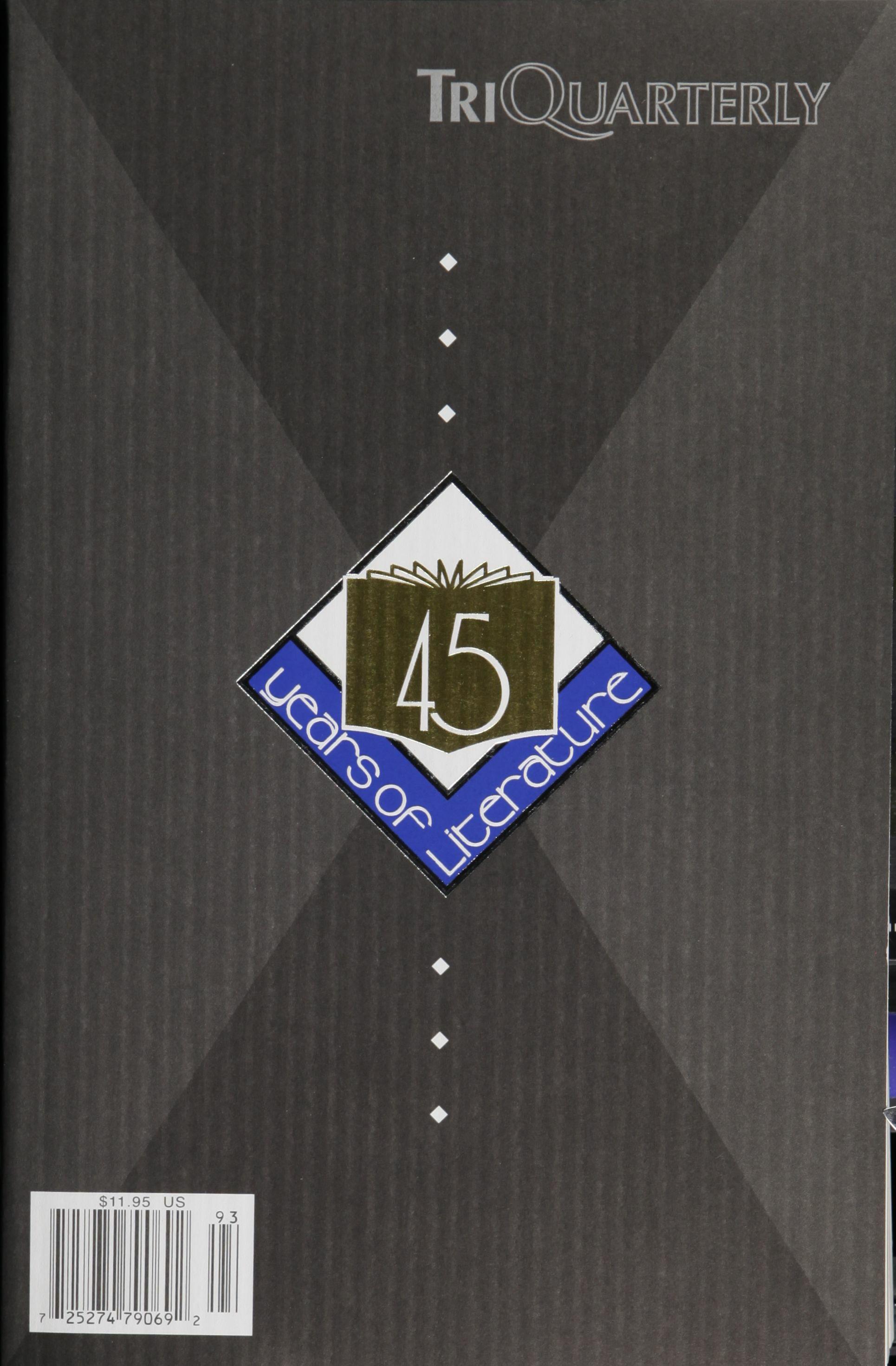

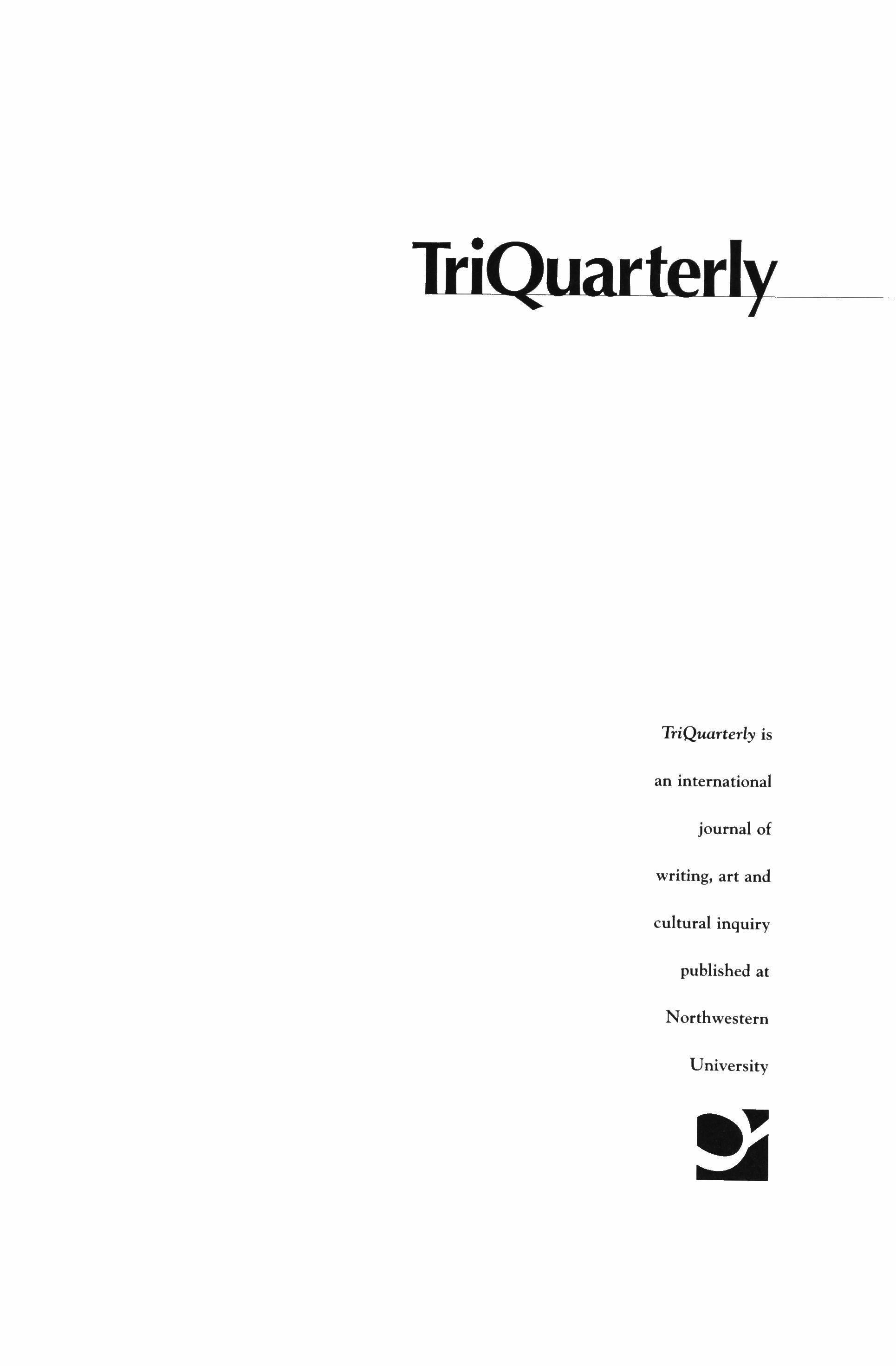
TriQuarterly
TriQuarterly is an international journal of writing, art and cultural inquiry published at Northwestern University

TriQuarteri¥-_____,
Editors of this issue: Susan Firestone Hahn and Ian Morris
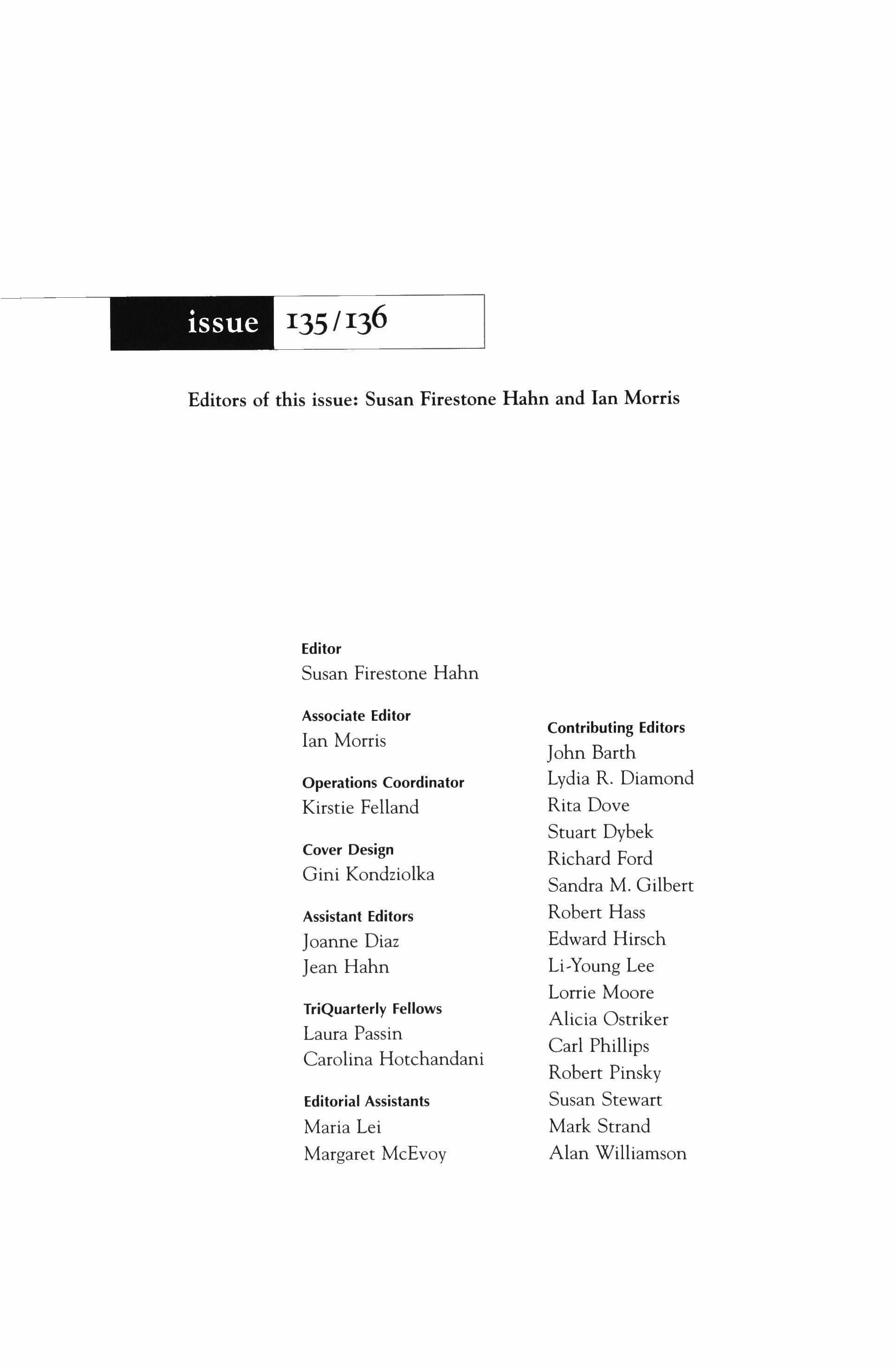
Editor
Susan Firestone Hahn
Associate Editor
Ian Morris
Operations Coordinator
Kirstie Felland
Cover Design
Gini Kondziolka
Assistant Editors
Joanne Diaz
Jean Hahn
TriQuarterly Fellows
Laura Passin
Carolina Hotchandani
Editorial Assistants
Maria Lei
Margaret McEvoy
Contributing Editors
John Barth
Lydia R. Diamond
Rita Dove
Stuart Dybek
Richard Ford
Sandra M. Gilbert
Robert Hass
Edward Hirsch
Li-Young Lee
Lorrie Moore
Alicia Ostriker
Carl Phillips
Robert Pinsky
Susan Stewart
Mark Strand
Alan Williamson
135/136

Don't cry because it's over.
Smile because it happened.
Dr. Seuss all forty-five years,
with one more print editionguest,edited by Edward Hirsch
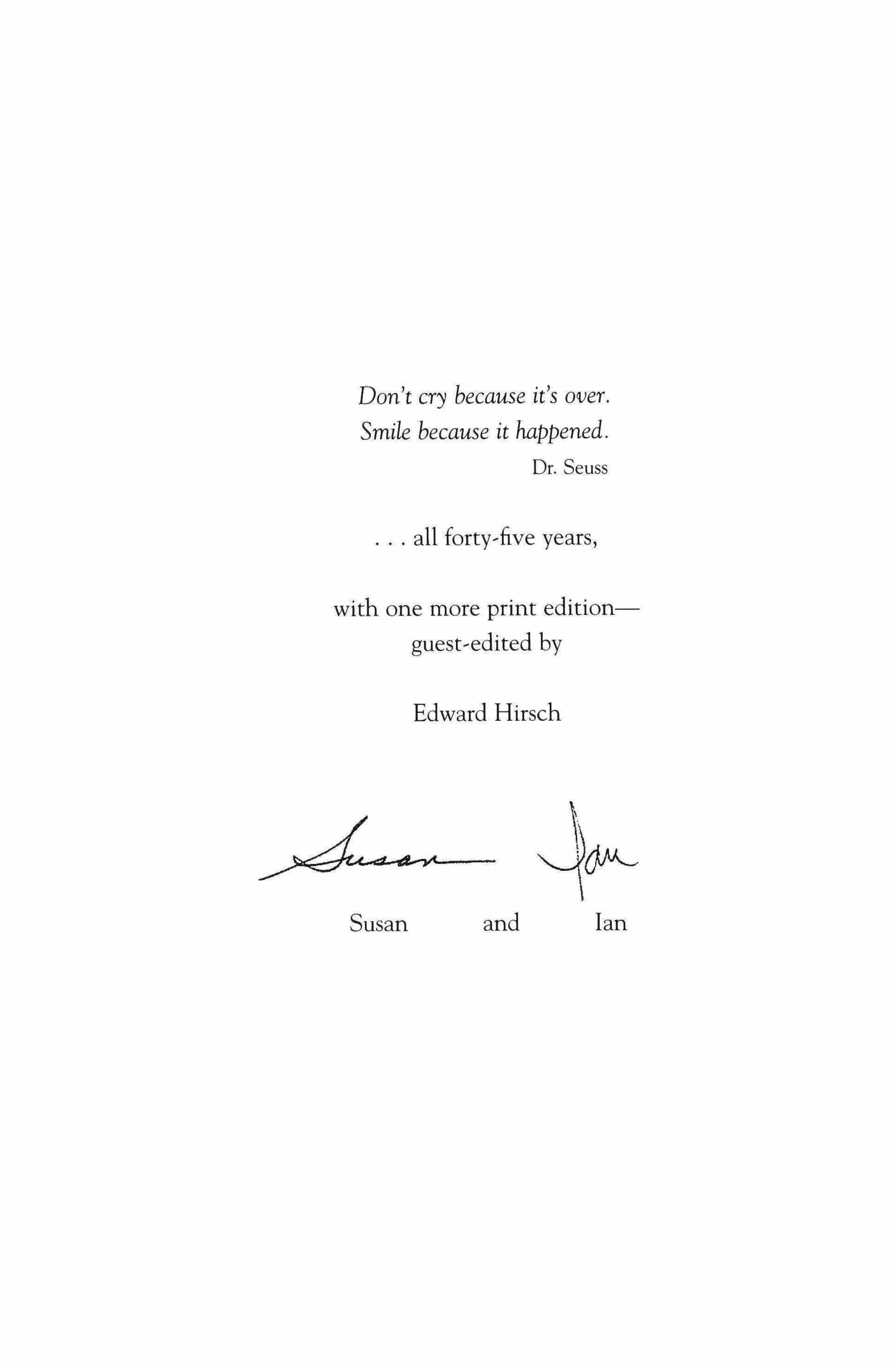
Susan and Ian

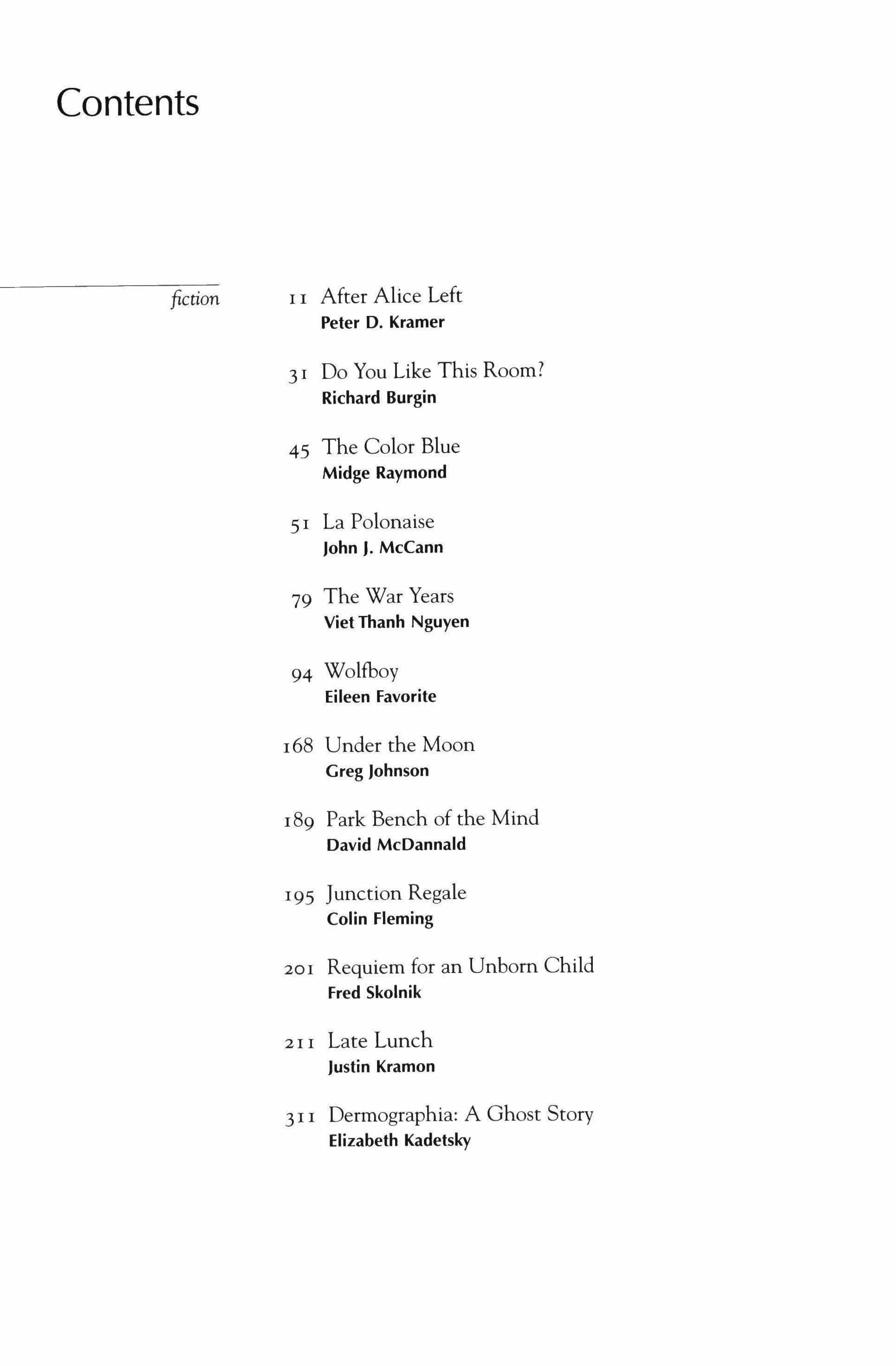
Contents fiction II After Alice Left
D. Kramer 31 Do You Like This Room? Richard Burgin 45 The Color Blue Midge Raymond 51 La Polonaise John J. McCann 79 The War Years Viet Thanh Nguyen 94 Wolfboy Eileen Favorite 168 Under the Moon Greg Johnson 189 Park Bench of the Mind David McDannald 195 Junction Regale Colin Fleming 201 Requiem for an Unborn Child Fred Skolnik 211 Late Lunch Justin Kramon 311 Dermographia: A Ghost Story Elizabeth Kadetsky
Peter
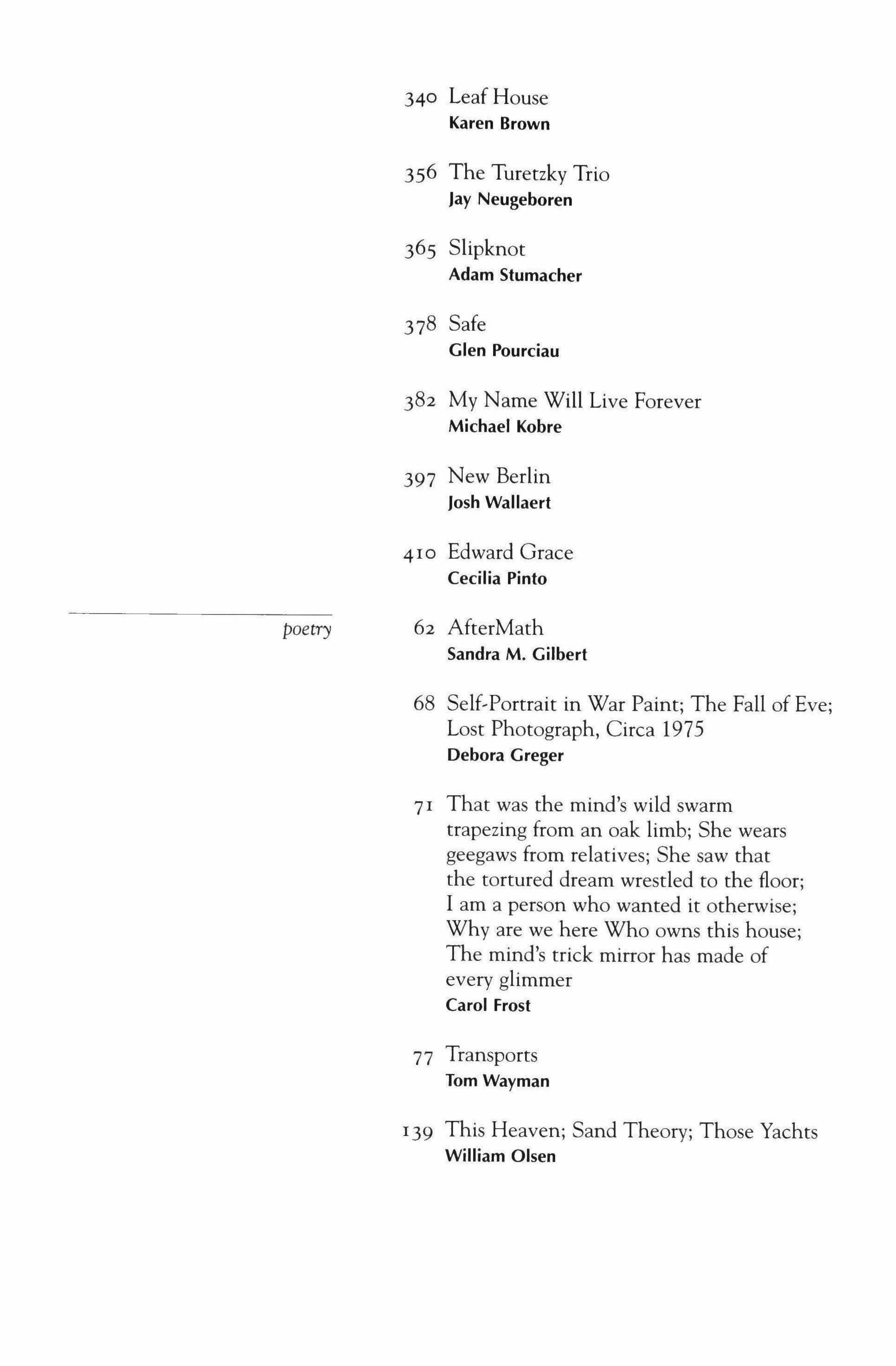
340 Leaf House
Karen Brown
356 The Turetzky Trio
Jay Neugeboren
365 Slipknot
Adam Stumacher
378 Safe
Glen Pourciau
382 My Name Will Live Forever
Michael Kobre
397 New Berlin
Josh Wallaert
410 Edward Grace
Cecilia Pinto
62 AfterMath
Sandra M. Gilbert
68 Self-Portrait in War Paint; The Fall of Eve; Lost Photograph, Circa 1975
Debora
Greger
71 That was the mind's wild swarm trapezing from an oak limb; She wears geegaws from relatives; She saw that the tortured dream wrestled to the floor; I am a person who wanted it otherwise; Why are we here Who owns this house; The mind's trick mirror has made of every glimmer
Carol Frost
77 Transports
Tom Wayman
139 This Heaven; Sand Theory; Those Yachts
William Olsen
poetry
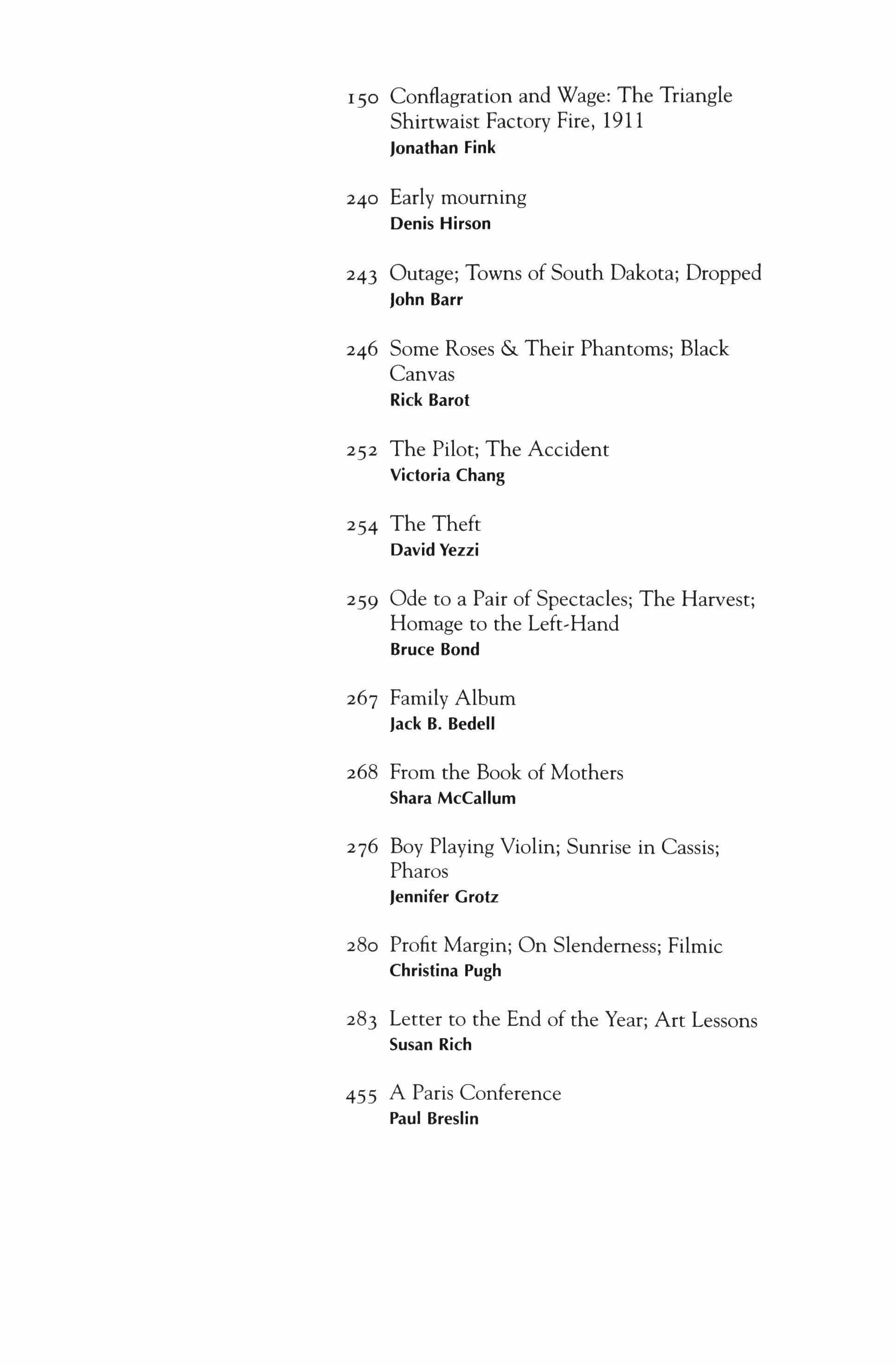
150 Conflagration and Wage: The Triangle
Shirtwaist Factory Fire, 1911
Jonathan Fink
240 Early mourning
Denis Hirson
243 Outage; Towns of South Dakota; Dropped
John Barr
246 Some Roses & Their Phantoms; Black
Canvas
Rick Barot
252 The Pilot; The Accident
Victoria Chang
254 The Theft
David Yezzi
259 Ode to a Pair of Spectacles; The Harvest; Homage to the Left-Hand
Bruce Bond
267 Family Album
Jack B. Bedell
268 From the Book of Mothers
Shara McCallum
276 Boy Playing Violin; Sunrise in Cassis; Pharos
Jennifer Grotz
280 Profit Margin; On Slenderness; Filmic
Christina Pugh
283 Letter to the End of the Year; Art Lessons
Susan Rich
455 A Paris Conference
Paul Breslin
essays
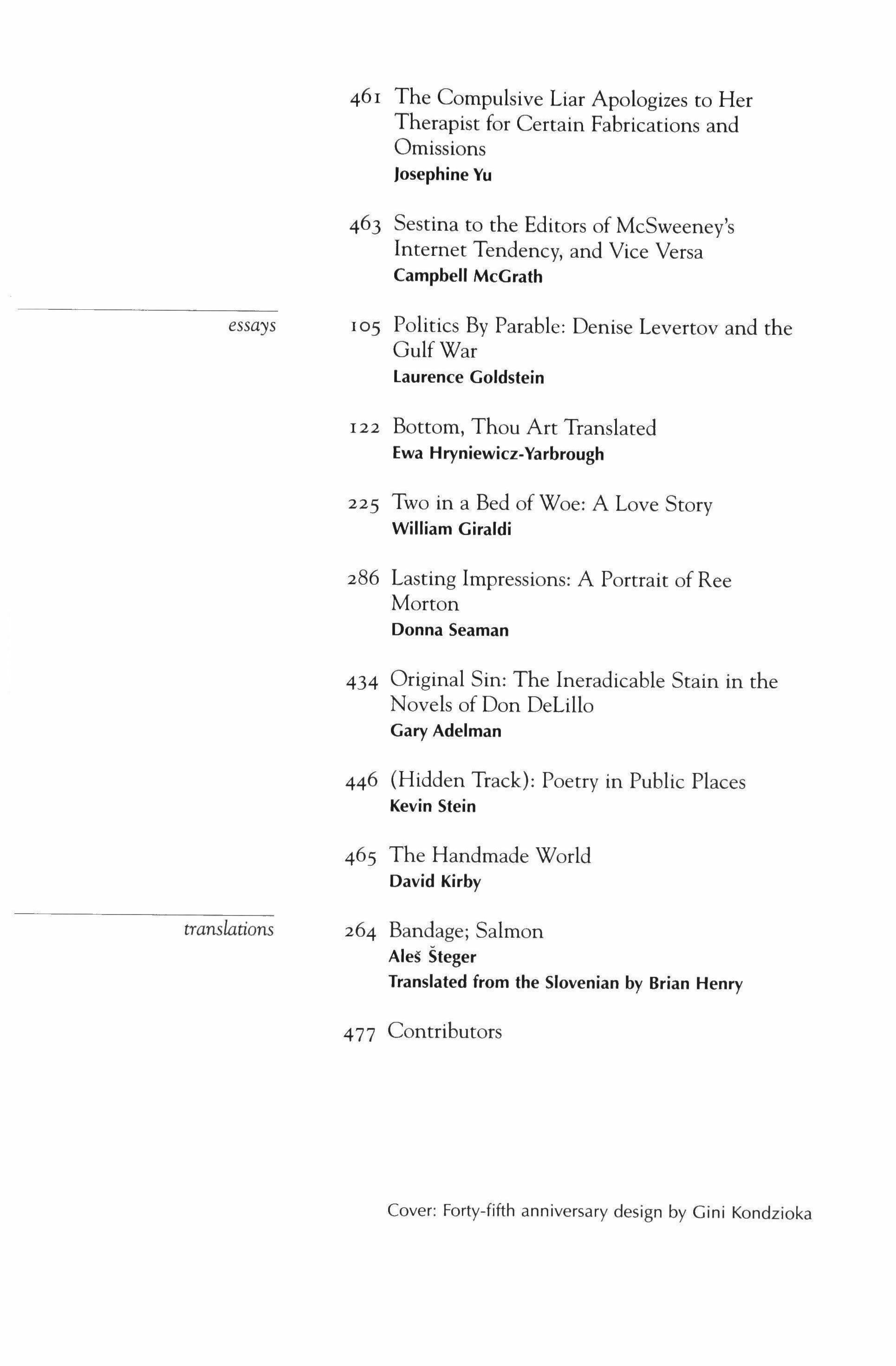
translations
461 The Compulsive Liar Apologizes to Her Therapist for Certain Fabrications and Omissions
Josephine Yu
463 Sestina to the Editors of McSweeney's Internet Tendency, and Vice Versa
Campbell McGrath
105 Politics By Parable: Denise Levertov and the Gulf War
Laurence Goldstein
122
Bottom, Thou Art Translated
Ewa Hryniewicz-Yarbrough
225 Two in a Bed of Woe: A Love Story
William Giraldi
286 Lasting Impressions: A Portrait of Ree
Morton
Donna Seaman
434 Original Sin: The Ineradicable Stain in the Novels of Don Delillo
Gary Adelman
446 (Hidden Track): Poetry in Public Places
Kevin Stein
465 The Handmade World
David Kirby
264 Bandage; Salmon
Ales Steger
Translated from the Siovenian by Brian Henry
477 Contributors
Cover: Forty-fifth anniversary design by Gini Kondzioka
Peter D. Kramer
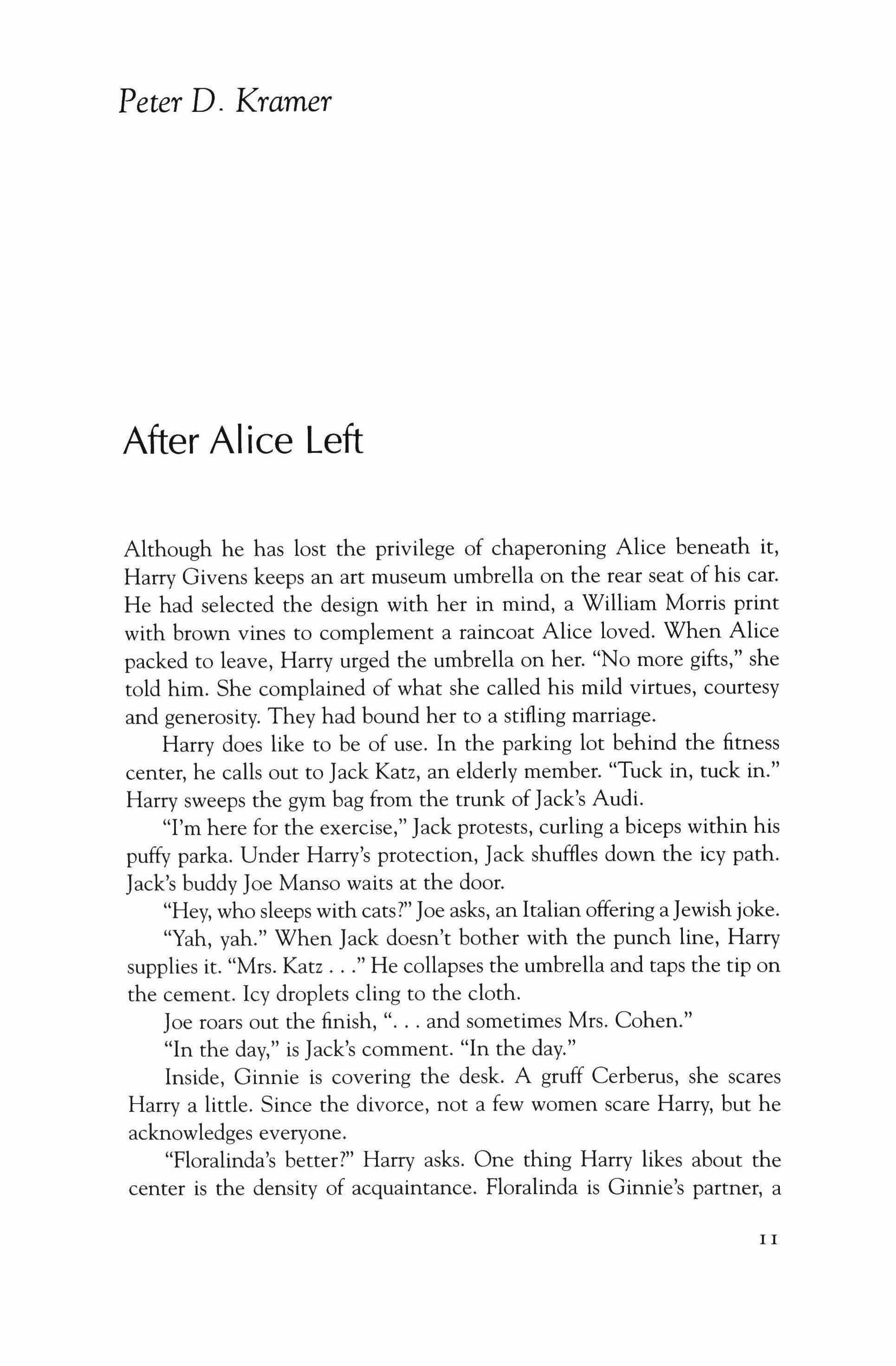
After AIice Left
Although he has lost the privilege of chaperoning Alice beneath it, Harry Givens keeps an art museum umbrella on the rear seat of his car. He had selected the design with her in mind, a William Morris print with brown vines to complement a raincoat Alice loved. When Alice packed to leave, Harry urged the umbrella on her. "No more gifts," she told him. She complained of what she called his mild virtues, courtesy and generosity. They had bound her to a stifling marriage.
Harry does like to be of use. In the parking lot behind the fitness center, he calls out to Jack Katz, an elderly member. "Tuck in, tuck in."
Harry sweeps the gym bag from the trunk ofJack's Audi.
"I'm here for the exercise," Jack protests, curling a biceps within his puffy parka. Under Harry's protection, Jack shuffles down the icy path. Jack's buddy Joe Manso waits at the door.
"Hey, who sleeps with cats?" Joe asks, an Italian offering a Jewish joke.
"Yah, yah." When Jack doesn't bother with the punch line, Harry supplies it. "Mrs. Katz He collapses the umbrella and taps the tip on the cement. Icy droplets cling to the cloth.
Joe roars out the finish, and sometimes Mrs. Cohen."
"In the day," is Jack's comment. "In the day."
Inside, Ginnie is covering the desk. A gruff Cerberus, she scares Harry a little. Since the divorce, not a few women scare Harry, but he acknowledges everyone.
"Floralinda's better?" Harry asks. One thing Harry likes about the center is the density of acquaintance. Floralinda is Ginnie's partner, a
I I

willowy blond who "in the day" would have hidden her tendencies. Now Harry, who knows Floralinda only from here-she is Membership Coordinator-has been privy to stories ofher inseminations, miscarriages, and once optimistic, now desperate gynecologic surgeries. Harry looks for, ward to that moment in the early morning when Floralinda drops by and gives Ginnie a peck on the cheek. He feels advanced for experiencing the poignancy of it, the slender reed's devotion to the sturdy oak.
Ginnie looks past Harry. "What, they emptied out the old age home?" She's no fan of the Jack and Joe show.
Jack reclaims the bag from Harry and fumbles in it until he finds what he wants. He waves his membership card under Ginnie's nose. Then he sees the new poster. "The sign," he says, "you stole it from a nursery school?" Deliberately, Jack read phrases aloud: "Respecting others. Giving space. Showing consideration." The Yiddish inflection ex, poses comedy in the word pairs.
Ginnie goes, "That notice is for you, Mr. K. You and your pal Manso. It says put your tongue back in your mouth so's you don't drool over the young mothers."
The center had been founded as a physical therapy clinic for the local Jewish hospital. This was two decades back. Anyone could join, but the emphasis was on the injured. Harry had brought his father after the first heart attack. There was no loud music, no fancy dress, no exhibitionistic athleticism. Any intrusive glances came from widows trying to catch the eye of a gentleman on the mend. Harry signed on and felt at home.
Recently, a childcare facility opened across the road. The young moth, ers, as Ginnie calls them, discovered the gym. They lodged complaints, ran for board seats, recruited personal trainers, and decked the walls with flat,screen TVs. The women gossip competitively about their husbands' careers and their children's precocity. Harry's not sure he'll re-up.
For now, he arrives at six-thirty, so he's done before school drop-off The problem is, his ex-wife's friends come early, too, Suzy, Joan, and Tara.
"And you, Mr. Givens," Ginnie is saying. "You're no saint."
Harry is a deep blusher. He had hoped it wasn't obvious, his lapse in decorum. In the young mothers' wake have come single women in their early thirties, drawn by the up-to-date amenities. Harry, who is forty, should find the new members attractive. Mostly he's cowed by their intensity. And yet-there is the one exception. Harry finds him' self fixated on a demurely tattooed bottle blonde, Lena Jadov. He does try to be discreet, believed he had been. In Harry's own book, leering is wrong. Leering, ogling-the very words are ugly. He has undertaken
12

various expedients to dampen his interest. Not that he can discuss these efforts with Ginnie, but in the grand moral accounting, they must work in his favor.
Seeing Harry flustered, Ginnie relents. "Flora's back on her feet. Thanks for asking."
Lena's all about fun. She's fab. She's sporty. She's into fashion.
Harry knows as much from Lena's Friendster Web page, where he has (a third ugly word) lurked.
She adores [lirting, keg parties, Bellinis, and mornings after. She's into men. She's between relationships.
This last is good news, or would be, were it not that Harry's aim, when he accessed the site, was to end his preoccupation. As he learned about Lena, he would find her pedestrian and so earn his release.
Harry happened upon Lena's last name when she dropped her ID and he retrieved it for her, at the sign-in desk.
"They shouldn't need these," Harry had said, as if to ally with Lena over the security policy instituted by the young mothers.
Lena pretended not to hear.
Harry recognized a calculus of politeness. If his staring had been obnoxious, his chitchat was gracious; since Lena had been rude in return, a rough balance had been restored. But ogling was the greater sin. And then there was the issue of subtler signals. Standing behind Lena's cornpact buttocks, entering into the halo of her fruity perfume, Harry had been aroused. They say women sense these things.
Harry did not find Lena pretty. Her face was broad and doughy. Yes, she had big eyes and Slavic cheekbones, but she overemphasized them with mascara and blush. The tattoos, waistband level on her back and left side, bespoke impulsivity. Perhaps the slight trashiness appealed, and the youth. Hints on the website put Lena at thirty-three. Still, younger women passed through the gym. He dreamt only of Lena.
Before he went into advertising, Harry had been trained as a sociologist. He knew that you never understand the individual case. Trends, perhaps. Men injured by divorce seek out women beneath their social class-that sort of generalization might be studied, but never the lust of this man for that woman. Besides, Harry's goal was not to explain his desire but to mute it.
Her favorite singer is Springsteen. Her favorite band is the Beatles.
Harry did not know pop music, but he saw that Lena's choices were
13
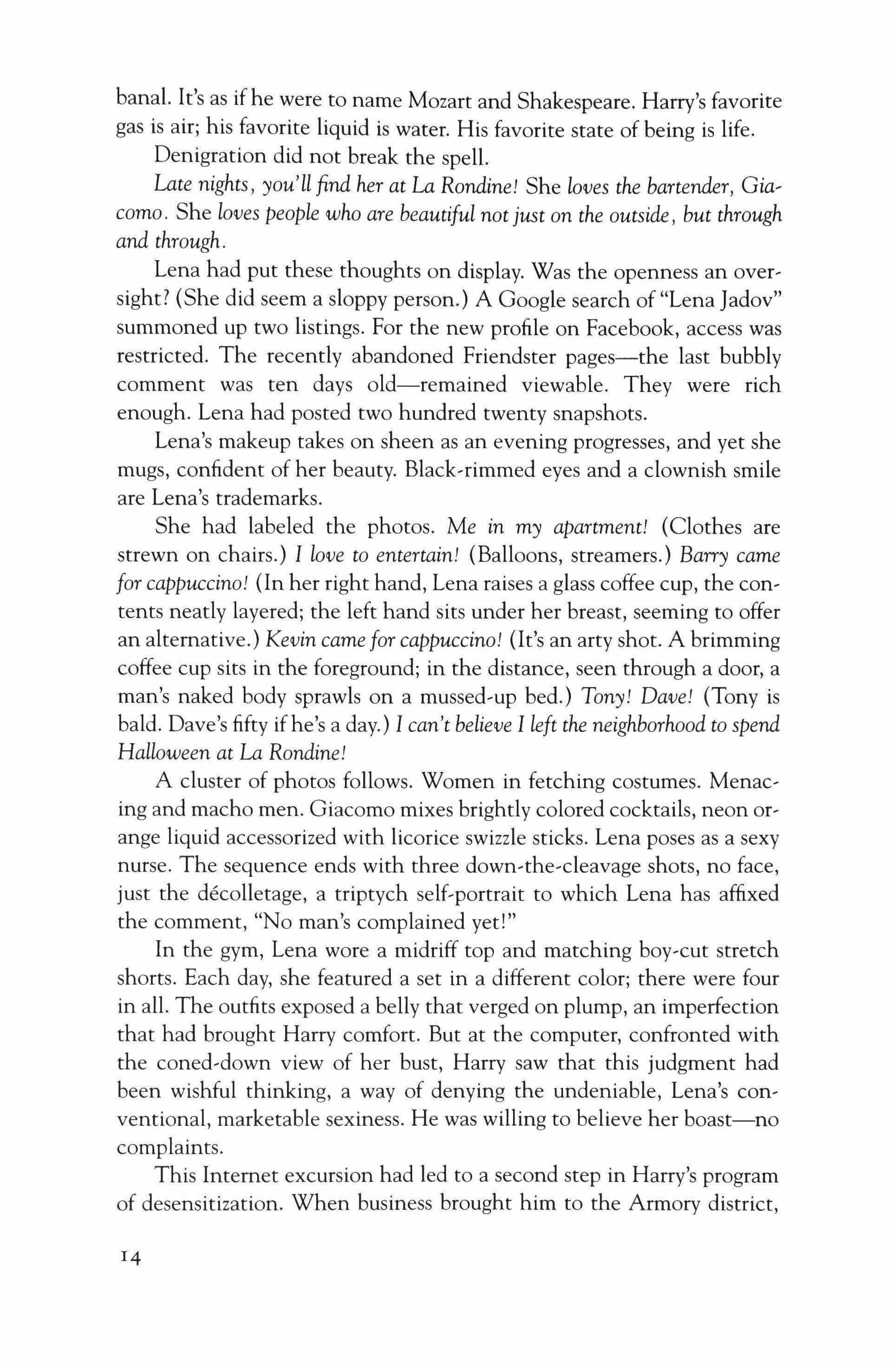
banal. It's as ifhe were to name Mozart and Shakespeare. Harry's favorite gas is air; his favorite liquid is water. His favorite state of being is life.
Denigration did not break the spell.
Late nights, you'll find her at La Rondine! She loves the bartender, Gia� como. She loves people who are beautiful not just on the outside, but through and through.
Lena had put these thoughts on display. Was the openness an oversight? (She did seem a sloppy person.) A Google search of "Lena Jadov" summoned up two listings. For the new profile on Facebook, access was restricted. The recently abandoned Friendster pages-the last bubbly comment was ten days old-remained viewable. They were rich enough. Lena had posted two hundred twenty snapshots.
Lena's makeup takes on sheen as an evening progresses, and yet she mugs, confident of her beauty. Black-rimmed eyes and a clownish smile are Lena's trademarks.
She had labeled the photos. Me in my apartment! (Clothes are strewn on chairs.) I love to entertain! (Balloons, streamers.) Barry came for cappuccino! (In her right hand, Lena raises a glass coffee cup, the contents neatly layered; the left hand sits under her breast, seeming to offer an alternative.) Kevin came for cappuccino! (It's an arty shot. A brimming coffee cup sits in the foreground; in the distance, seen through a door, a man's naked body sprawls on a mussed-up bed.) Tony! Dave! (Tony is bald. Dave's fifty ifhe's a day.) I can't believe I left the neighborhood to spend Halloween at La Rondine!
A cluster of photos follows. Women in fetching costumes. Menacing and macho men. Giacomo mixes brightly colored cocktails, neon orange liquid accessorized with licorice swizzle sticks. Lena poses as a sexy nurse. The sequence ends with three down-the-cleavage shots, no face, just the decolletage, a triptych self-portrait to which Lena has affixed the comment, "No man's complained yet!"
In the gym, Lena wore a midriff top and matching boy-cut stretch shorts. Each day, she featured a set in a different color; there were four in all. The outfits exposed a belly that verged on plump, an imperfection that had brought Harry comfort. But at the computer, confronted with the coned-down view of her bust, Harry saw that this judgment had been wishful thinking, a way of denying the undeniable, Lena's conventional, marketable sexiness. He was willing to believe her boast-no complaints.
This Internet excursion had led to a second step in Harry's program of desensitization. When business brought him to the Armory district,
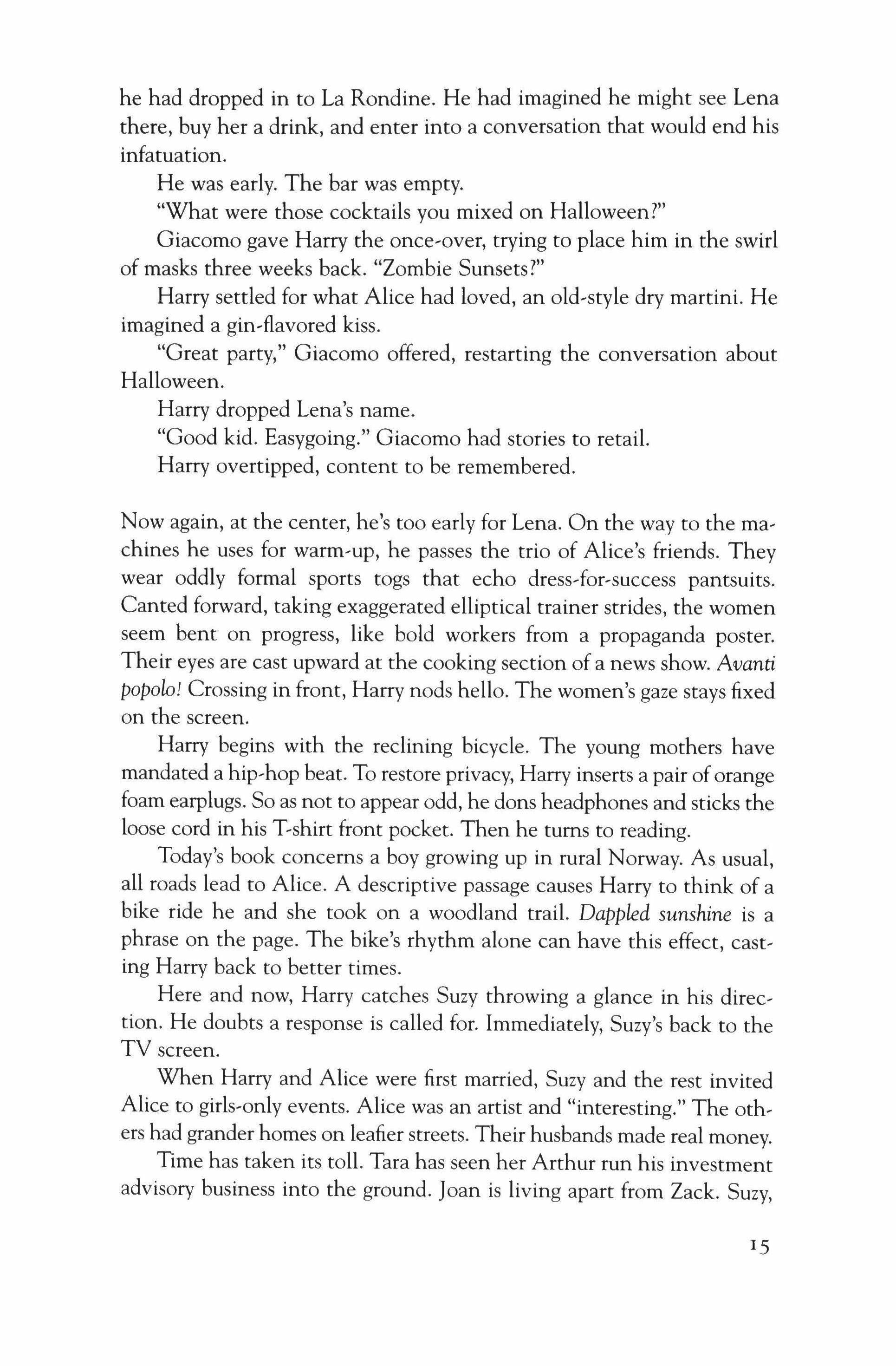
he had dropped in to La Rondine. He had imagined he might see Lena there, buy her a drink, and enter into a conversation that would end his infatuation.
He was early. The bar was empty.
"What were those cocktails you mixed on Halloween?"
Giacomo gave Harry the once-over, trying to place him in the swirl of masks three weeks back. "Zombie Sunsets?"
Harry settled for what Alice had loved, an old-style dry martini. He imagined a gin-flavored kiss.
"Great party," Giacomo offered, restarting the conversation about Halloween.
Harry dropped Lena's name.
"Good kid. Easygoing." Giacomo had stories to retail.
Harry overtipped, content to be remembered.
Now again, at the center, he's too early for Lena. On the way to the machines he uses for warm-up, he passes the trio of Alice's friends. They wear oddly formal sports togs that echo dress-far-success pantsuits. Canted forward, taking exaggerated elliptical trainer strides, the women seem bent on progress, like bold workers from a propaganda poster. Their eyes are cast upward at the cooking section of a news show. Avanti popolo! Crossing in front, Harry nods hello. The women's gaze stays fixed on the screen.
Harry begins with the reclining bicycle. The young mothers have mandated a hip-hop beat. To restore privacy, Harry inserts a pair of orange foam earplugs. So as not to appear odd, he dons headphones and sticks the loose cord in his T-shirt front pocket. Then he turns to reading.
Today's book concerns a boy growing up in rural Norway. As usual, all roads lead to Alice. A descriptive passage causes Harry to think of a bike ride he and she took on a woodland trail. Dappled sunshine is a phrase on the page. The bike's rhythm alone can have this effect, casting Harry back to better times.
Here and now, Harry catches Suzy throwing a glance in his direction. He doubts a response is called for. Immediately, Suzy's back to the TV screen.
When Harry and Alice were first married, Suzy and the rest invited Alice to girls-only events. Alice was an artist and "interesting." The others had grander homes on leafier streets. Their husbands made real money.
Time has taken its toll. Tara has seen her Arthur run his investment advisory business into the ground. Joan is living apart from Zack. Suzy,
15
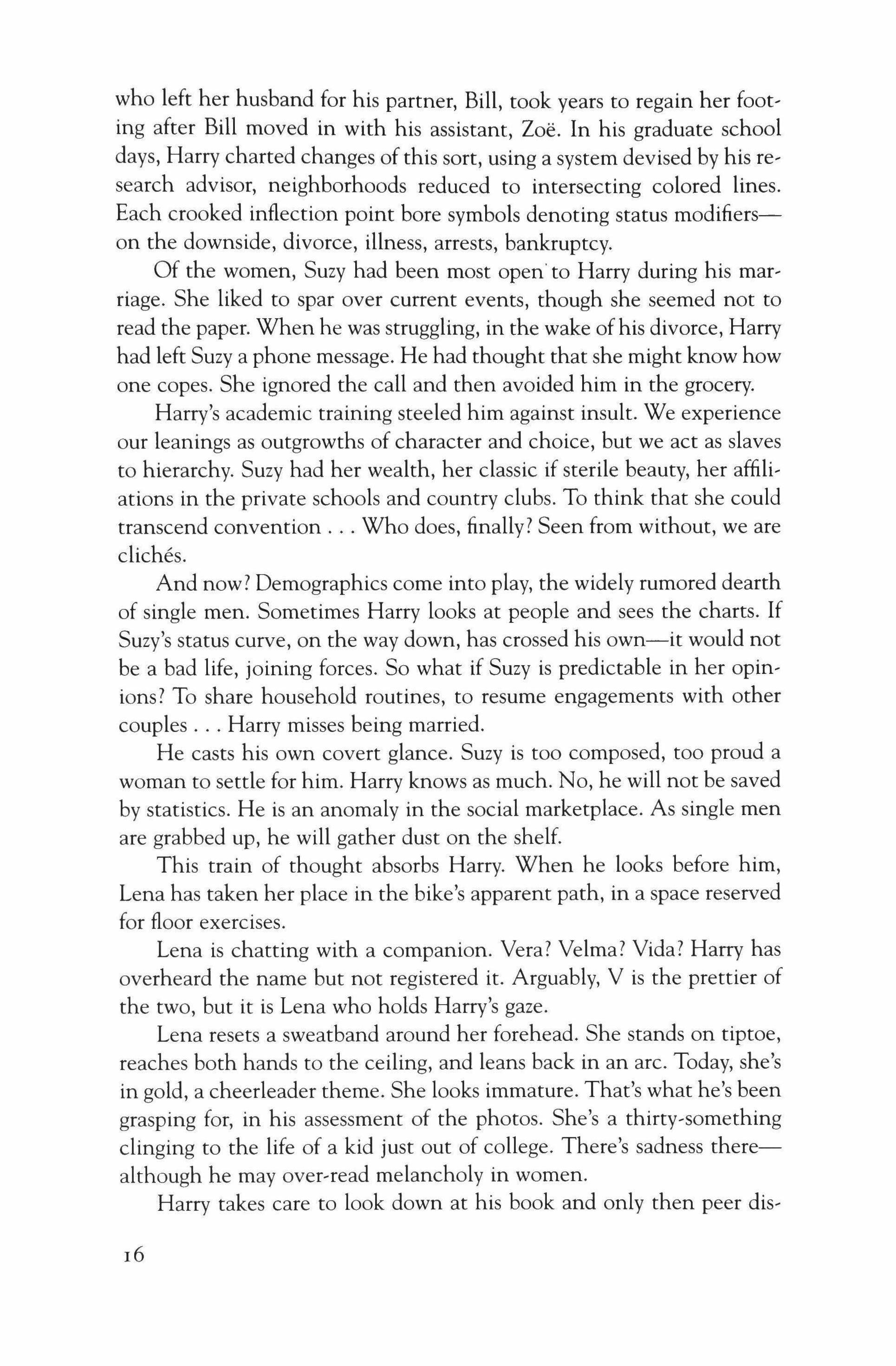
who left her husband for his partner, Bill, took years to regain her foot, ing after Bill moved in with his assistant, Zoe. In his graduate school days, Harry charted changes of this sort, using a system devised by his research advisor, neighborhoods reduced to intersecting colored lines. Each crooked inflection point bore symbols denoting status modifierson the downside, divorce, illness, arrests, bankruptcy.
Of the women, Suzy had been most opento Harry during his mar, riage. She liked to spar over current events, though she seemed not to read the paper. When he was struggling, in the wake ofhis divorce, Harry had left Suzy a phone message. He had thought that she might know how one copes. She ignored the call and then avoided him in the grocery.
Harry's academic training steeled him against insult. We experience our leanings as outgrowths of character and choice, but we act as slaves to hierarchy. Suzy had her wealth, her classic if sterile beauty, her affiliations in the private schools and country clubs. To think that she could transcend convention Who does, finally? Seen from without, we are cliches.
And now? Demographics come into play, the widely rumored dearth of single men. Sometimes Harry looks at people and sees the charts. If Suzy's status curve, on the way down, has crossed his own-it would not be a bad life, joining forces. So what if Suzy is predictable in her opinions? To share household routines, to resume engagements with other couples Harry misses being married.
He casts his own covert glance. Suzy is too composed, too proud a woman to settle for him. Harry knows as much. No, he will not be saved by statistics. He is an anomaly in the social marketplace. As single men are grabbed up, he will gather dust on the shelf.
This train of thought absorbs Harry. When he looks before him, Lena has taken her place in the bike's apparent path, in a space reserved for floor exercises.
Lena is chatting with a companion. Vera? Velma? Vida? Harry has overheard the name but not registered it. Arguably, V is the prettier of the two, but it is Lena who holds Harry's gaze.
Lena resets a sweatband around her forehead. She stands on tiptoe, reaches both hands to the ceiling, and leans back in an arc. Today, she's in gold, a cheerleader theme. She looks immature. That's what he's been grasping for, in his assessment of the photos. She's a thirty-something clinging to the life of a kid just out of college. There's sadness therealthough he may over-read melancholy in women.
Harry takes care to look down at his book and only then peer dis,
16
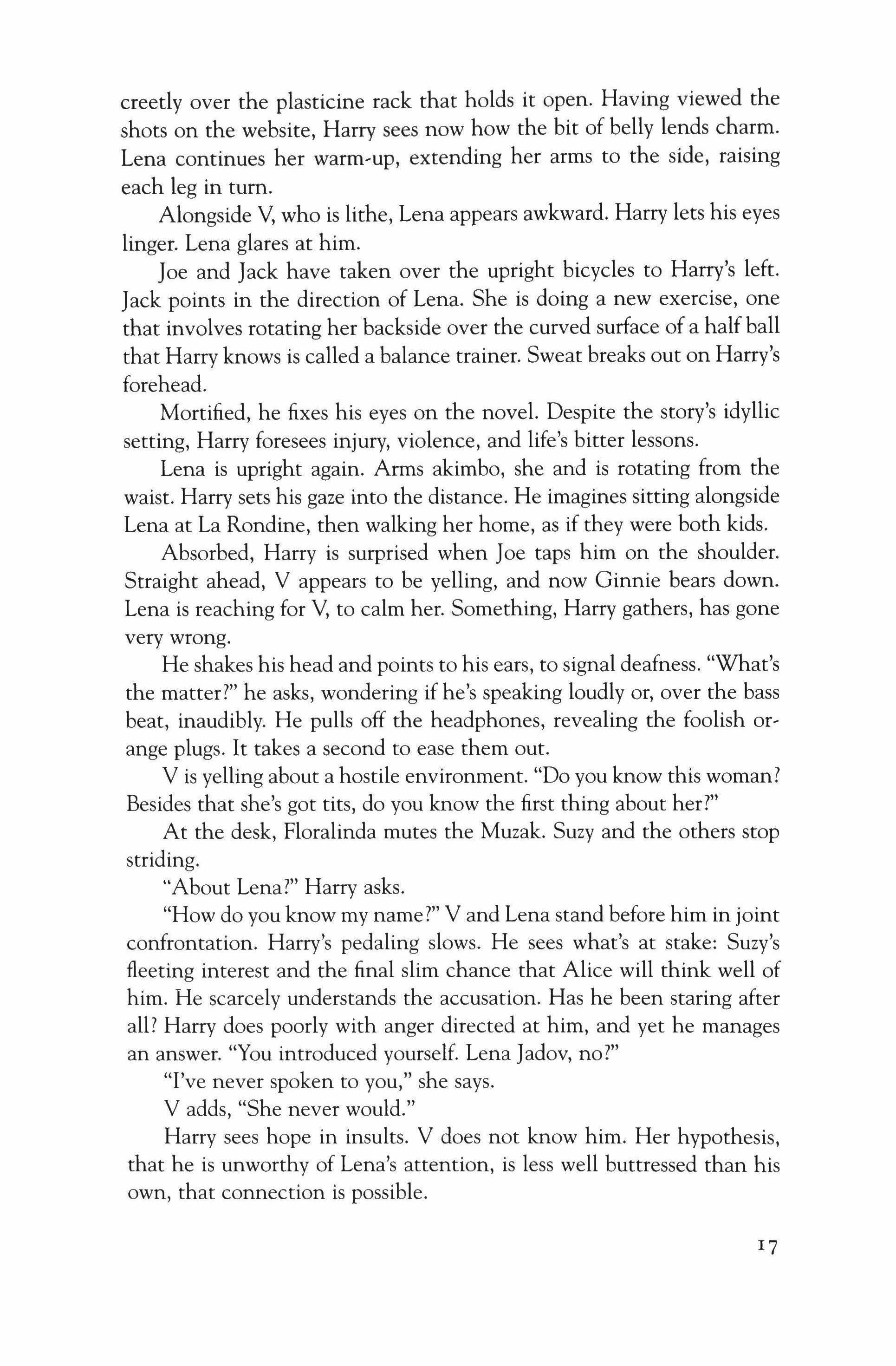
erectly over the plasticine rack that holds it open. Having viewed the shots on the website, Harry sees now how the bit of belly lends charm. Lena continues her warm-up, extending her arms to the side, raising each leg in tum.
Alongside V, who is lithe, Lena appears awkward. Harry lets his eyes linger. Lena glares at him.
Joe and Jack have taken over the upright bicycles to Harry's left. Jack points in the direction of Lena. She is doing a new exercise, one that involves rotating her backside over the curved surface of a half ball that Harry knows is called a balance trainer. Sweat breaks out on Harry's forehead.
Mortified, he fixes his eyes on the novel. Despite the story's idyllic setting, Harry foresees injury, violence, and life's bitter lessons.
Lena is upright again. Arms akimbo, she and is rotating from the waist. Harry sets his gaze into the distance. He imagines sitting alongside Lena at La Rondine, then walking her home, as if they were both kids.
Absorbed, Harry is surprised when Joe taps him on the shoulder. Straight ahead, V appears to be yelling, and now Ginnie bears down. Lena is reaching for V, to calm her. Something, Harry gathers, has gone very wrong.
He shakes his head and points to his ears, to signal deafness. "What's the matter?" he asks, wondering if he's speaking loudly or, over the bass beat, inaudibly. He pulls off the headphones, revealing the foolish orange plugs. It takes a second to ease them out.
V is yelling about a hostile environment. "Do you know this woman? Besides that she's got tits, do you know the first thing about her?"
At the desk, Floralinda mutes the Muzak. Suzy and the others stop striding.
"About Lena?" Harry asks.
"How do you know my name?" V and Lena stand before him in joint confrontation. Harry's pedaling slows. He sees what's at stake: Suzy's fleeting interest and the final slim chance that Alice will think well of him. He scarcely understands the accusation. Has he been staring after all? Harry does poorly with anger directed at him, and yet he manages an answer. "You introduced yourself. Lena Jadov, no?"
"I've never spoken to you," she says.
V adds, "She never would."
Harry sees hope in insults. V does not know him. Her hypothesis, that he is unworthy of Lena's attention, is less well buttressed than his own, that connection is possible.
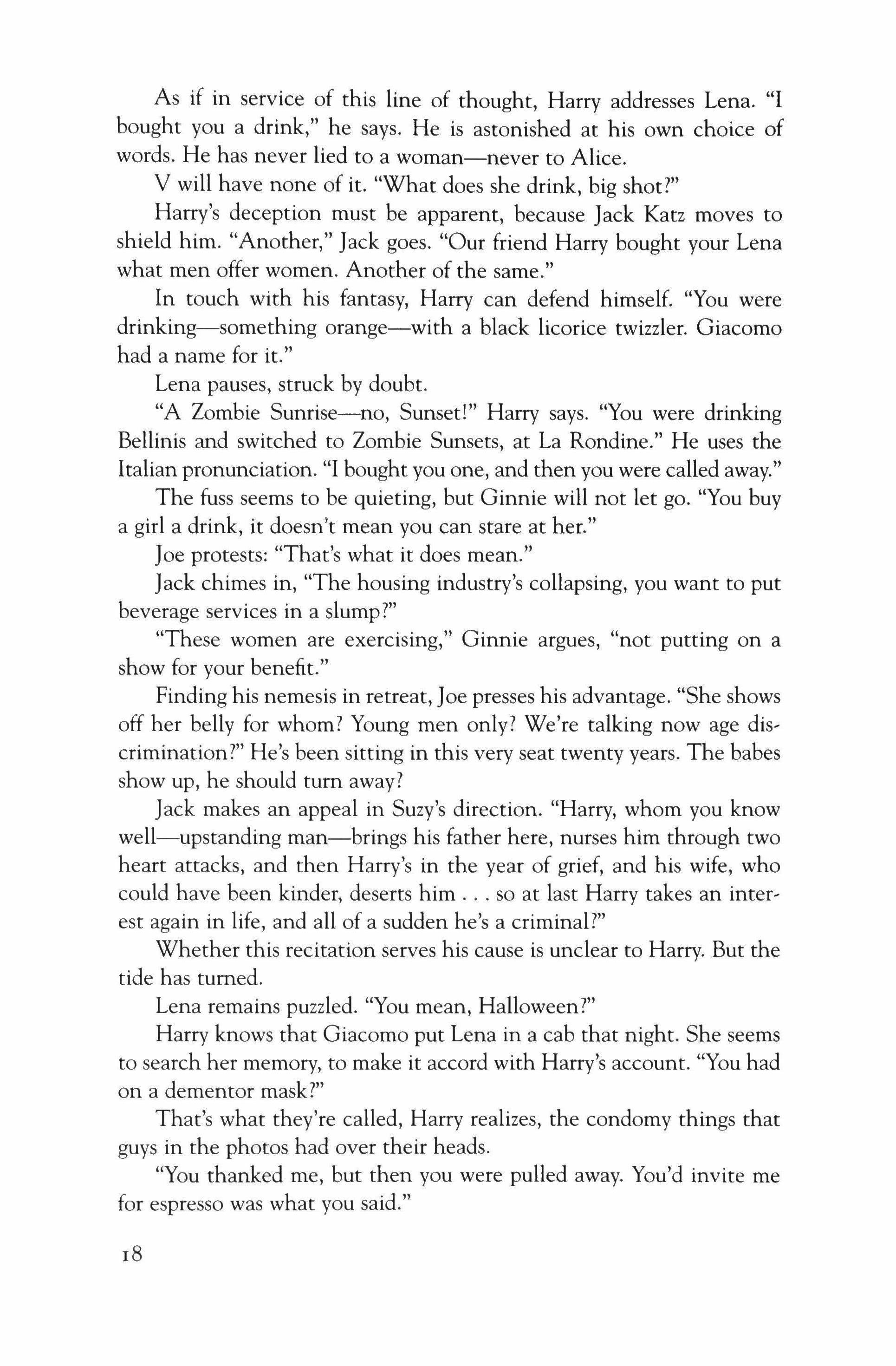
As if in service of this line of thought, Harry addresses Lena. "I bought you a drink," he says. He is astonished at his own choice of words. He has never lied to a woman-never to Alice.
Y will have none of it. "What does she drink, big shot?"
Harry's deception must be apparent, because Jack Katz moves to shield him. "Another," Jack goes. "Our friend Harry bought your Lena what men offer women. Another of the same."
In touch with his fantasy, Harry can defend himself. "You were drinking-something orange-with a black licorice twizzler. Giacomo had a name for it."
Lena pauses, struck by doubt.
"A Zombie Sunrise-no, Sunset!" Harry says. "You were drinking Bellinis and switched to Zombie Sunsets, at La Rondine." He uses the Italian pronunciation. "I bought you one, and then you were called away."
The fuss seems to be quieting, but Ginnie will not let go. "You buy a girl a drink, it doesn't mean you can stare at her."
Joe protests: "That's what it does mean."
Jack chimes in, "The housing industry's collapsing, you want to put beverage services in a slump?"
"These women are exercising," Ginnie argues, "not putting on a show for your benefit."
Finding his nemesis in retreat, Joe presses his advantage. "She shows off her belly for whom? Young men only? We're talking now age discrimination?" He's been sitting in this very seat twenty years. The babes show up, he should tum away?
Jack makes an appeal in Suzy's direction. "Harry, whom you know well-upstanding man-brings his father here, nurses him through two heart attacks, and then Harry's in the year of grief, and his wife, who could have been kinder, deserts him so at last Harry takes an interest again in life, and all of a sudden he's a criminal?"
Whether this recitation serves his cause is unclear to Harry. But the tide has turned.
Lena remains puzzled. "You mean, Halloween?"
Harry knows that Giacomo put Lena in a cab that night. She seems to search her memory, to make it accord with Harry's account. "You had on a dementor mask?"
That's what they're called, Harry realizes, the condomy things that guys in the photos had over their heads.
"You thanked me, but then you were pulled away. You'd invite me for espresso was what you said."

"Cappuccino," Lena goes.
Harry has made the slight error on purpose. It's a trick he learned in his marriage, making mistakes to gain acknowledgment. "Cappuccino."
"Oh my Lena continues, in a sudden access of insight. "You were so " She giggles, fetchingly.
Ginnie, in her official role, must be more direct. "Harry, I owe you an apology. The policy is new. We'll need to discuss how to apply it."
"You buy this bullshit?" Like a lawyer for a client who has concealed a salient detail, V finds her case in ruins.
It's Jack who frames the encounter as Harry would wish. "It seems our Miss Jadov owes Mr. Givens a cuppa."
"Shoe's on the other foot," Joe says. "Who's impolite."
Lena has made as if to retreat to the locker room, but the attribution of rudeness makes her hesitate.
"Coffee's on me," Harry says, by way of peace offering. "Shower up. I'll buy you a Starbucks."
Lena is busy. Another time will have to do.
To his surprise, two days later, Harry receives a call from Suzy.
"So unfair!" she says. "As if you would intrude on that girl!"
Harry is not cynical, and yet he can hardly avoid the assumption that his fictional behavior has nudged Suzy into action. For a man of middle age to dress in costume, show up at a singles bar, and court young women by standing them to drinks-if asked, Suzy would mock every step of this sequence. And yet, the image of the evening has put Harry in play.
Harry thanks Suzy for her concern. He doesn't blame Lena. Too often men do intrude.
"Did she apologize?"
Harry gathers that Suzy wants to know whether the meeting over coffee took place.
"Not in so many words." The answer, he trusts, leaves enough to the imagination. He adds, "I wonder whether words are her forte."
"I should think not." Then, ignoring what Harry has just said, Suzy asks, "What do you talk about with her?"
The question of conversation has been on Harry's mind. He's fiddling with the idea of teaching a sociology course at the community college. In Alice's absence, in the long nights, he has pulled old books from the shelves: Marx, Weber, even Baudrillard. Harry has read about prestige, how it emerges in the web of relationship, our fortune arising from
19
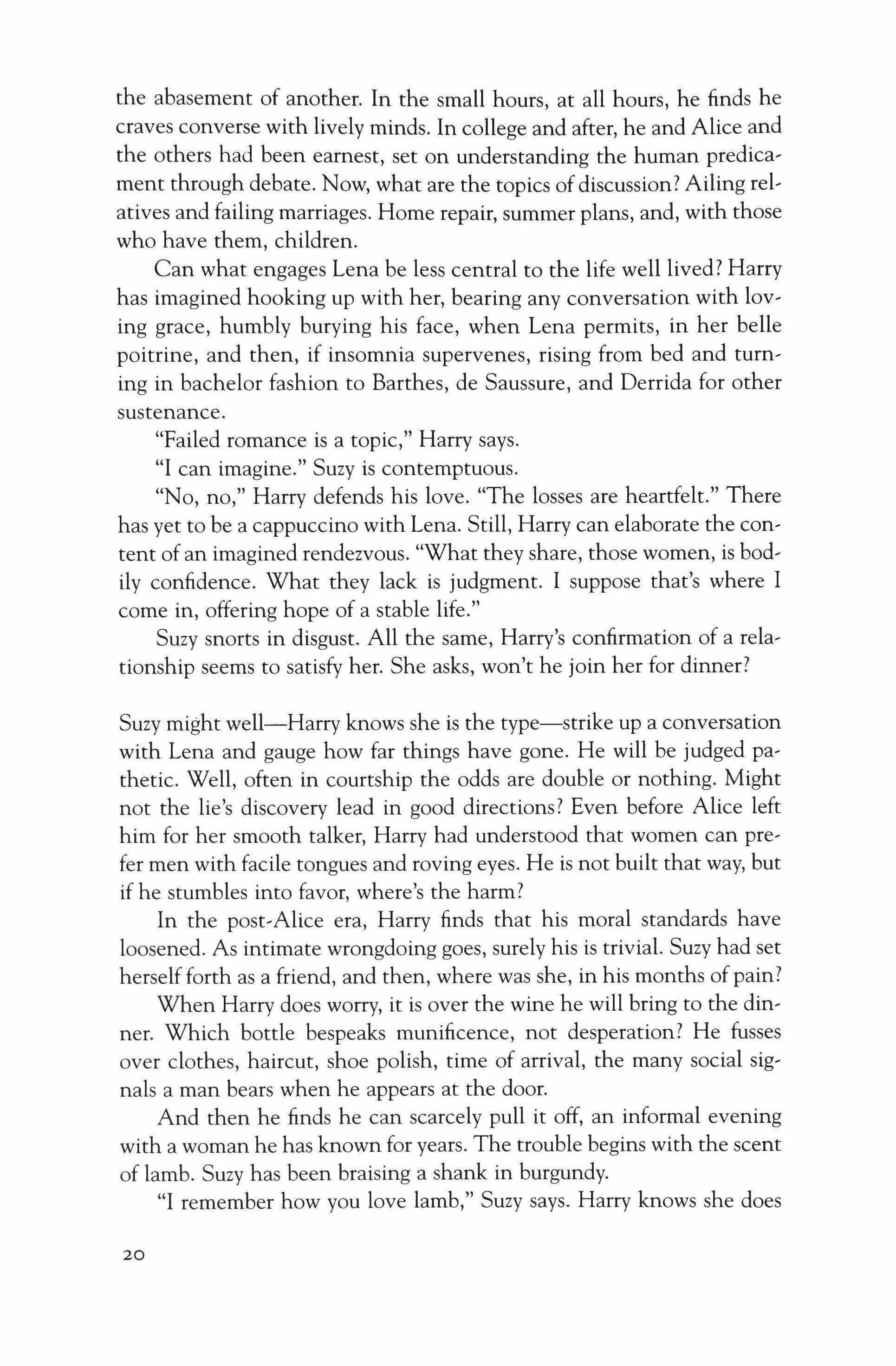
the abasement of another. In the small hours, at all hours, he finds he craves converse with lively minds. In college and after, he and Alice and the others had been earnest, set on understanding the human predicament through debate. Now, what are the topics ofdiscussion? Ailing relatives and failing marriages. Home repair, summer plans, and, with those who have them, children.
Can what engages Lena be less central to the life well lived? Harry has imagined hooking up with her, bearing any conversation with loving grace, humbly burying his face, when Lena permits, in her belle poitrine, and then, if insomnia supervenes, rising from bed and turning in bachelor fashion to Barthes, de Saussure, and Derrida for other sustenance.
"Failed romance is a topic," Harry says.
"I can imagine." Suzy is contemptuous.
"No, no," Harry defends his love. "The losses are heartfelt." There has yet to be a cappuccino with Lena. Still, Harry can elaborate the content of an imagined rendezvous. "What they share, those women, is bodily confidence. What they lack is judgment. I suppose that's where I come in, offering hope of a stable life."
Suzy snorts in disgust. All the same, Harry's confirmation of a relationship seems to satisfy her. She asks, won't he join her for dinner?
Suzy might well-Harry knows she is the type-strike up a conversation with Lena and gauge how far things have gone. He will be judged pathetic. Well, often in courtship the odds are double or nothing. Might not the lie's discovery lead in good directions? Even before Alice left him for her smooth talker, Harry had understood that women can prefer men with facile tongues and roving eyes. He is not built that way, but if he stumbles into favor, where's the harm?
In the post-Alice era, Harry finds that his moral standards have loosened. As intimate wrongdoing goes, surely his is trivial. Suzy had set herself forth as a friend, and then, where was she, in his months ofpain?
When Harry does worry, it is over the wine he will bring to the dinnero Which bottle bespeaks munificence, not desperation? He fusses over clothes, haircut, shoe polish, time of arrival, the many social sig� nals a man bears when he appears at the door.
And then he finds he can scarcely pull it off, an informal evening with a woman he has known for years. The trouble begins with the scent of lamb. Suzy has been braising a shank in burgundy.
"I remember how you love lamb," Suzy says. Harry knows she does
20
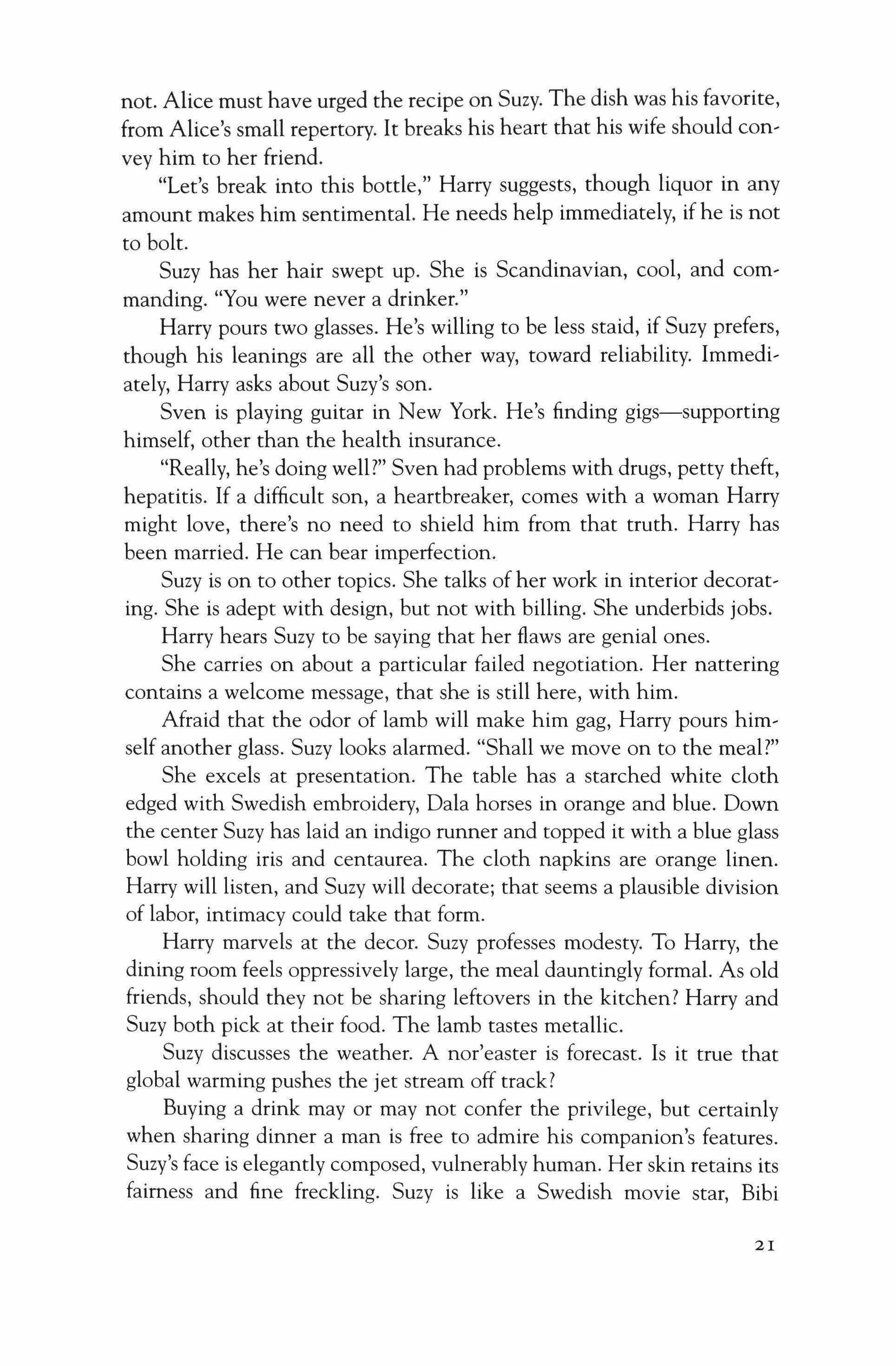
not. Alice must have urged the recipe on Suzy. The dish was his favorite, from Alice's small repertory. It breaks his heart that his wife should con' vey him to her friend.
"Let's break into this bottle," Harry suggests, though liquor in any amount makes him sentimentaL He needs help immediately, if he is not to bolt.
Suzy has her hair swept up. She is Scandinavian, cool, and com, manding. "You were never a drinker."
Harry pours two glasses. He's willing to be less staid, if Suzy prefers, though his leanings are all the other way, toward reliability. Immediately, Harry asks about Suzy's son.
Sven is playing guitar in New York. He's finding gigs-supporting himself, other than the health insurance.
"Really, he's doing well?" Sven had problems with drugs, petty theft, hepatitis. If a difficult son, a heartbreaker, comes with a woman Harry might love, there's no need to shield him from that truth. Harry has been married. He can bear imperfection.
Suzy is on to other topics. She talks of her work in interior decorating. She is adept with design, but not with billing. She underbids jobs. Harry hears Suzy to be saying that her flaws are genial ones.
She carries on about a particular failed negotiation. Her nattering contains a welcome message, that she is still here, with him.
Afraid that the odor of lamb will make him gag, Harry pours him, self another glass. Suzy looks alarmed. "Shall we move on to the meal?"
She excels at presentation. The table has a starched white cloth edged with Swedish embroidery, Dala horses in orange and blue. Down the center Suzy has laid an indigo runner and topped it with a blue glass bowl holding iris and centaurea. The cloth napkins are orange linen. Harry will listen, and Suzy will decorate; that seems a plausible division of labor, intimacy could take that form.
Harry marvels at the decor. Suzy professes modesty. To Harry, the dining room feels oppressively large, the meal dauntingly formaL As old friends, should they not be sharing leftovers in the kitchen? Harry and Suzy both pick at their food. The lamb tastes metallic.
Suzy discusses the weather. A nor'easter is forecast. Is it true that global warming pushes the jet stream off track?
Buying a drink may or may not confer the privilege, but certainly when sharing dinner a man is free to admire his companion's features. Suzy's face is elegantly composed, vulnerably human. Her skin retains its fairness and fine freckling. Suzy is like a Swedish movie star, Bibi
21
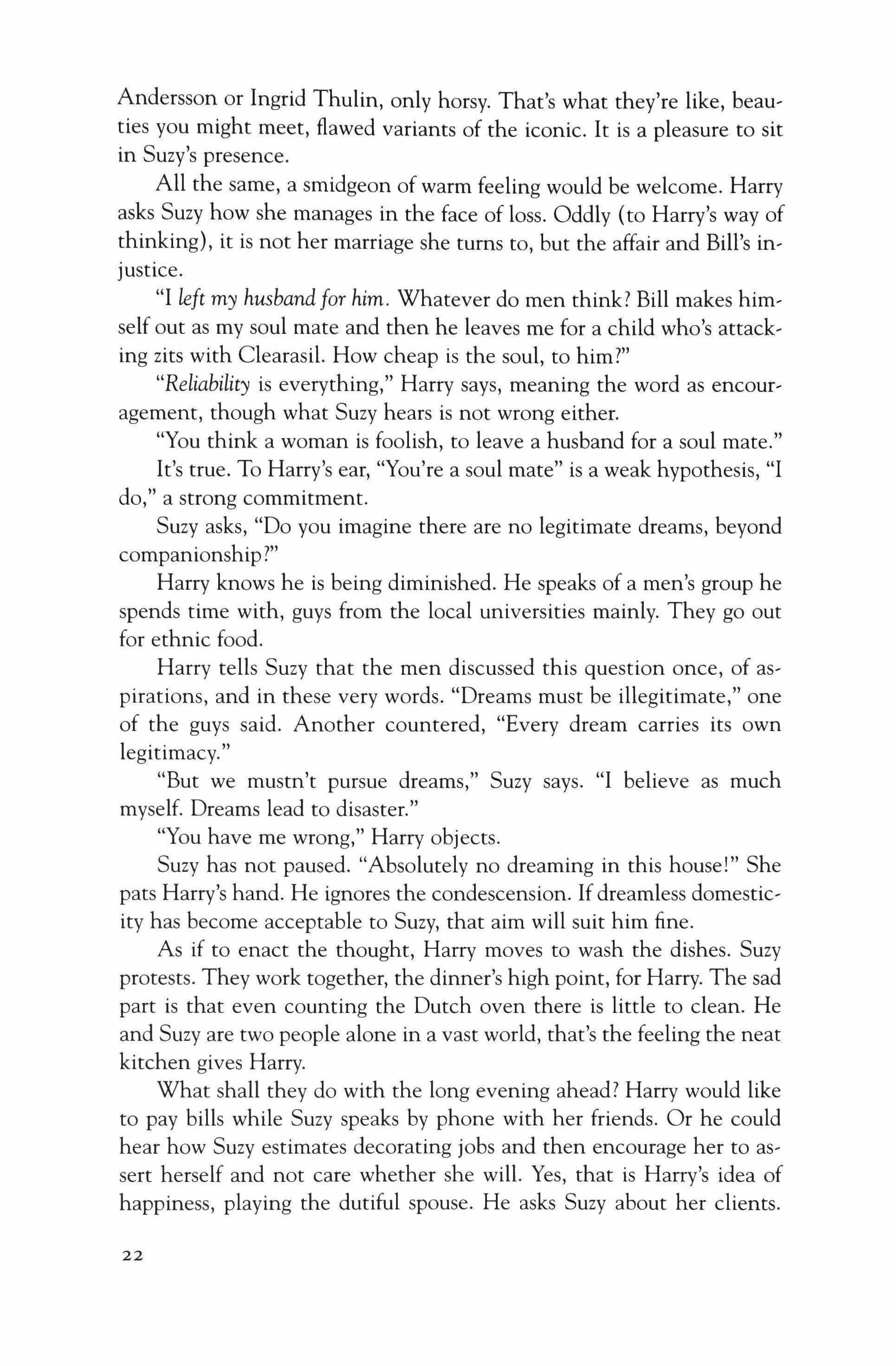
Andersson or Ingrid Thulin, only horsy. That's what they're like, beauties you might meet, flawed variants of the iconic. It is a pleasure to sit in Suzy's presence.
All the same, a smidgeon of warm feeling would be welcome. Harry asks Suzy how she manages in the face of loss. Oddly (to Harry's way of thinking), it is not her marriage she turns to, but the affair and Bill's injustice.
"I left my husband for him. Whatever do men think? Bill makes himself out as my soul mate and then he leaves me for a child who's attacking zits with Clearasil. How cheap is the soul, to him?"
"Reliability is everything," Harry says, meaning the word as encouragement, though what Suzy hears is not wrong either.
"You think a woman is foolish, to leave a husband for a soul mate."
It's true. To Harry's ear, "You're a soul mate" is a weak hypothesis, "I do," a strong commitment.
Suzy asks, "Do you imagine there are no legitimate dreams, beyond companionship?"
Harry knows he is being diminished. He speaks of a men's group he spends time with, guys from the local universities mainly. They go out for ethnic food.
Harry tells Suzy that the men discussed this question once, of aspirations, and in these very words. "Dreams must be illegitimate," one of the guys said. Another countered, "Every dream carries its own legitimacy."
"But we mustn't pursue dreams," Suzy says. "I believe as much myself. Dreams lead to disaster."
"You have me wrong," Harry objects.
Suzy has not paused. "Absolutely no dreaming in this house!" She pats Harry's hand. He ignores the condescension. If dreamless domesticity has become acceptable to Suzy, that aim will suit him fine.
As if to enact the thought, Harry moves to wash the dishes. Suzy protests. They work together, the dinner's high point, for Harry. The sad part is that even counting the Dutch oven there is little to clean. He and Suzy are two people alone in a vast world, that's the feeling the neat kitchen gives Harry.
What shall they do with the long evening ahead? Harry would like to pay bills while Suzy speaks by phone with her friends. Or he could hear how Suzy estimates decorating jobs and then encourage her to assert herself and not care whether she will. Yes, that is Harry's idea of happiness, playing the dutiful spouse. He asks Suzy about her clients.
22
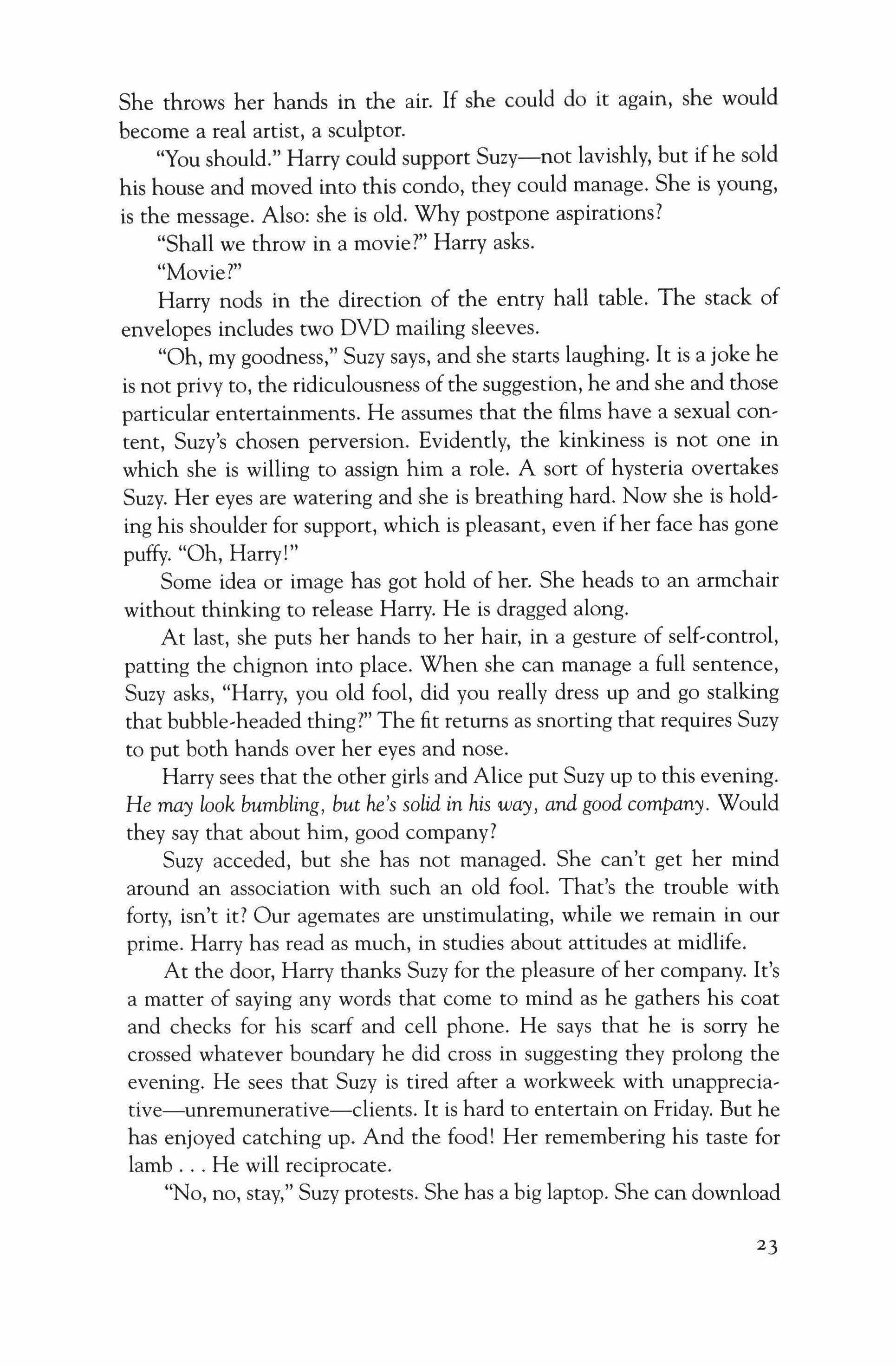
She throws her hands in the air. If she could do it again, she would become a real artist, a sculptor.
"You should." Harry could support Suzy-not lavishly, but if he sold his house and moved into this condo, they could manage. She is young, is the message. Also: she is old. Why postpone aspirations?
"Shall we throw in a movie?" Harry asks.
"Movie?"
Harry nods in the direction of the entry hall table. The stack of envelopes includes two DVD mailing sleeves.
"Oh, my goodness," Suzy says, and she starts laughing. It is a joke he is not privy to, the ridiculousness of the suggestion, he and she and those particular entertainments. He assumes that the films have a sexual content, Suzy's chosen perversion. Evidently, the kinkiness is not one in which she is willing to assign him a role. A sort of hysteria overtakes Suzy. Her eyes are watering and she is breathing hard. Now she is holding his shoulder for support, which is pleasant, even if her face has gone puffy. "Oh, Harry!"
Some idea or image has got hold of her. She heads to an armchair without thinking to release Harry. He is dragged along.
At last, she puts her hands to her hair, in a gesture of self-control, patting the chignon into place. When she can manage a full sentence, Suzy asks, "Harry, you old fool, did you really dress up and go stalking that bubble-headed thing?" The fit returns as snorting that requires Suzy to put both hands over her eyes and nose.
Harry sees that the other girls and Alice put Suzy up to this evening. He may look bumbling, but he's solid in his way, and good company. Would they say that about him, good company?
Suzy acceded, but she has not managed. She can't get her mind around an association with such an old fool. That's the trouble with forty, isn't it? Our agemates are unstimulating, while we remain in our prime. Harry has read as much, in studies about attitudes at midlife.
At the door, Harry thanks Suzy for the pleasure of her company. It's a matter of saying any words that come to mind as he gathers his coat and checks for his scarf and cell phone. He says that he is sorry he crossed whatever boundary he did cross in suggesting they prolong the evening. He sees that Suzy is tired after a workweek with unappreciative-unremunerative-clients. It is hard to entertain on Friday. But he has enjoyed catching up. And the food! Her remembering his taste for lamb He will reciprocate.
"No, no, stay," Suzy protests. She has a big laptop. She can download
23
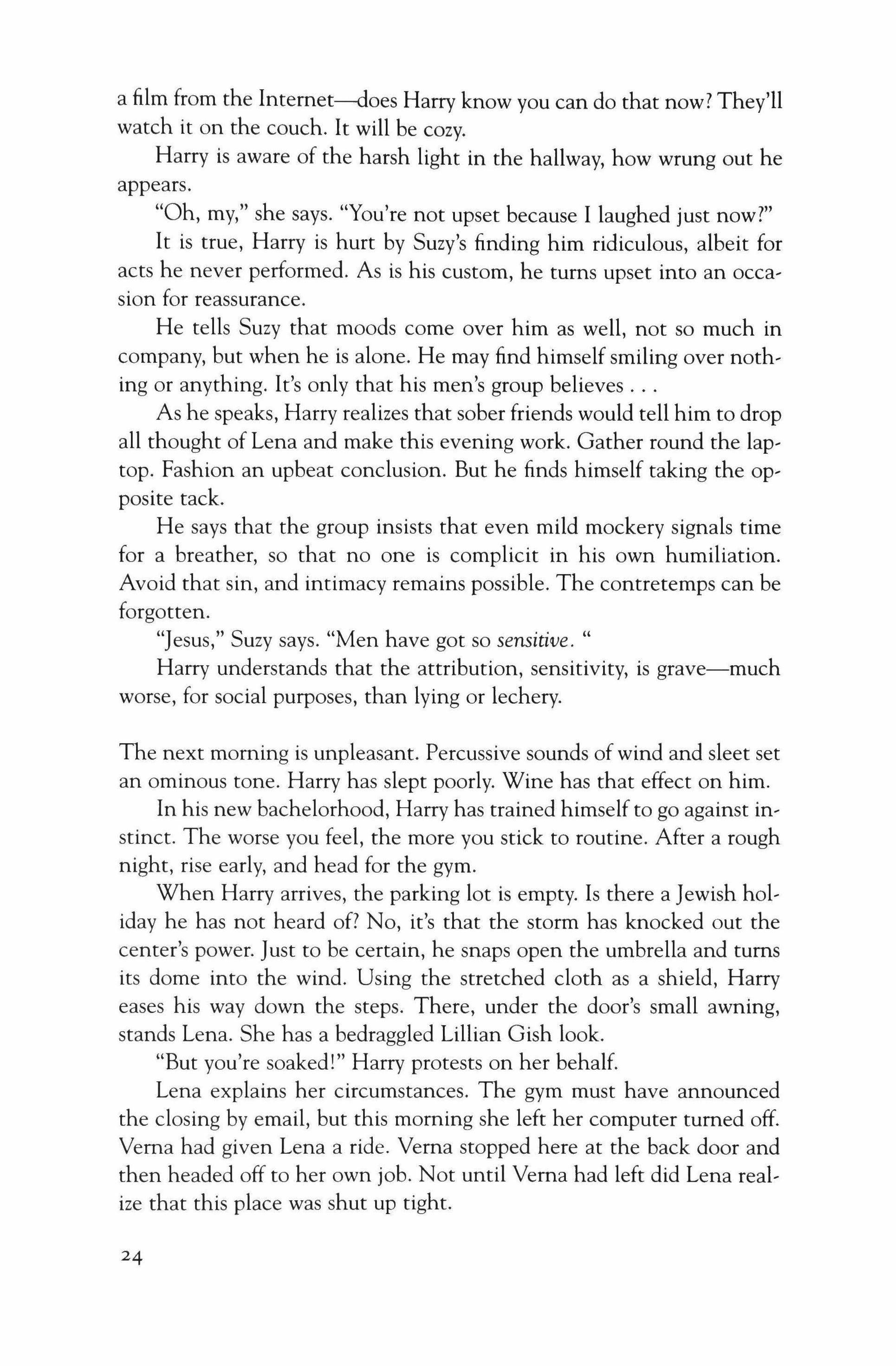
a film from the Internet--does Harry know you can do that now? They'll watch it on the couch. It will be cozy.
Harry is aware of the harsh light in the hallway, how wrung out he appears.
"Oh, my," she says. "You're not upset because I laughed just now?"
It is true, Harry is hurt by Suzy's finding him ridiculous, albeit for acts he never performed. As is his custom, he turns upset into an occasion for reassurance.
He tells Suzy that moods come over him as well, not so much in company, but when he is alone. He may find himself smiling over nothing or anything. It's only that his men's group believes
As he speaks, Harry realizes that sober friends would tell him to drop all thought of Lena and make this evening work. Gather round the lap' top. Fashion an upbeat conclusion. But he finds himself taking the opposite tack.
He says that the group insists that even mild mockery signals time for a breather, so that no one is cornplicit in his own humiliation. Avoid that sin, and intimacy remains possible. The contretemps can be forgotten.
"J "S "M h " esus, uzy says. en ave got so sensztwe.
Harry understands that the attribution, sensitivity, is grave-much worse, for social purposes, than lying or lechery.
The next morning is unpleasant. Percussive sounds of wind and sleet set an ominous tone. Harry has slept poorly. Wine has that effect on him.
In his new bachelorhood, Harry has trained himself to go against in' stinct. The worse you feel, the more you stick to routine. After a rough night, rise early, and head for the gym.
When Harry arrives, the parking lot is empty. Is there a Jewish holiday he has not heard of? No, it's that the storm has knocked out the center's power. Just to be certain, he snaps open the umbrella and turns its dome into the wind. Using the stretched cloth as a shield, Harry eases his way down the steps. There, under the door's small awning, stands Lena. She has a bedraggled Lillian Gish look.
"But you're soaked!" Harry protests on her behalf.
Lena explains her circumstances. The gym must have announced the closing by email, but this morning she left her computer turned off. Vema had given Lena a ride. Vema stopped here at the back door and then headed off to her own job. Not until Vema had left did Lena real, ize that this place was shut up tight.
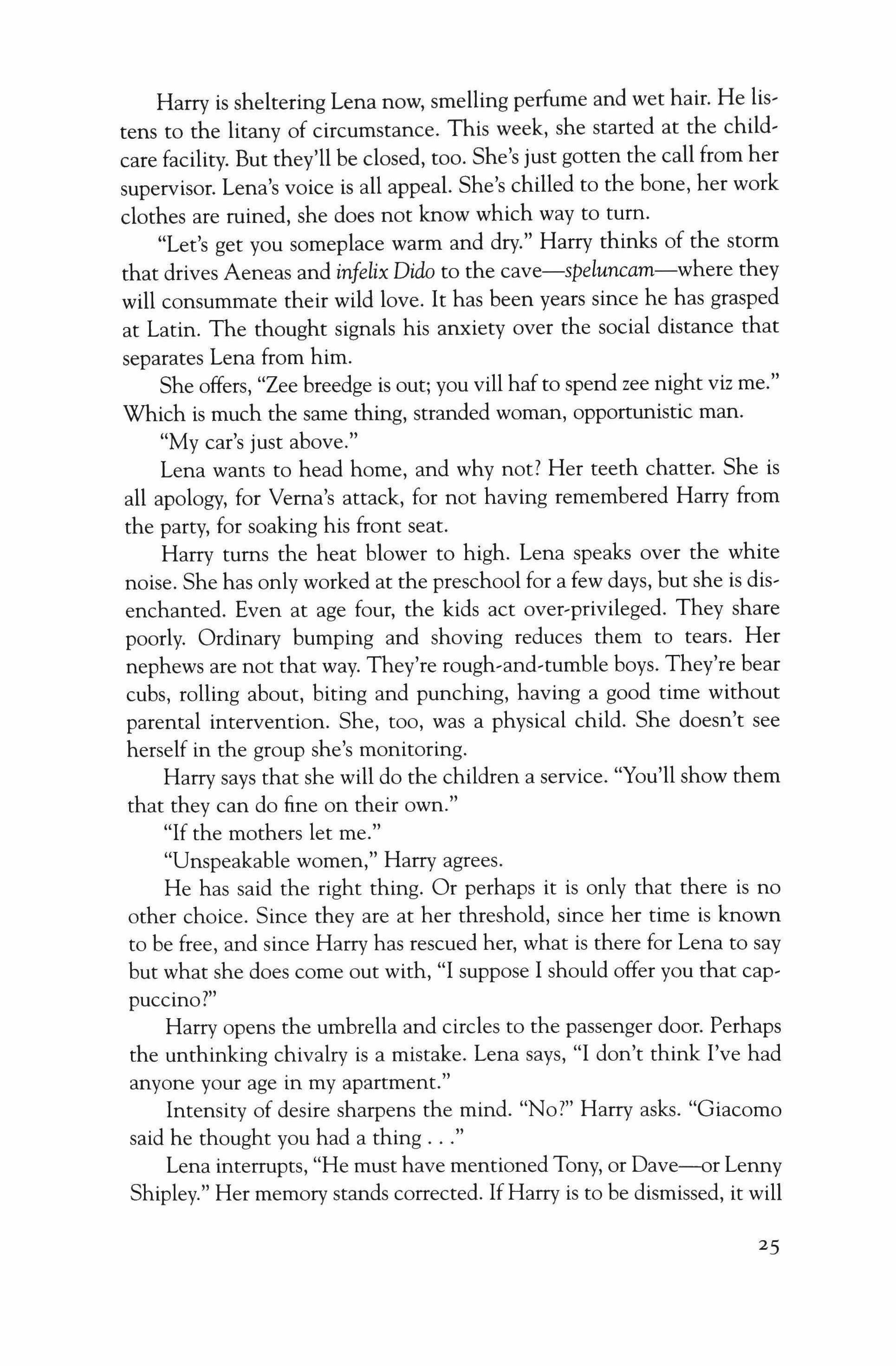
Harry is sheltering Lena now, smelling perfume and wet hair. He listens to the litany of circumstance. This week, she started at the childcare facility. But they'll be closed, too. She's just gotten the call from her supervisor. Lena's voice is all appeal. She's chilled to the bone, her work clothes are ruined, she does not know which way to turn.
"Let's get you someplace warm and dry." Harry thinks of the storm that drives Aeneas and infelix Dido to the cave-speluncam-where they will consummate their wild love. It has been years since he has grasped at Latin. The thought signals his anxiety over the social distance that separates Lena from him.
She offers, "Zee breedge is out; you vill haf to spend zee night viz me." Which is much the same thing, stranded woman, opportunistic man.
"My car's just above."
Lena wants to head home, and why not? Her teeth chatter. She is all apology, for Verna's attack, for not having remembered Harry from the party, for soaking his front seat.
Harry turns the heat blower to high. Lena speaks over the white noise. She has only worked at the preschool for a few days, but she is disenchanted. Even at age four, the kids act over-privileged. They share poorly. Ordinary bumping and shoving reduces them to tears. Her nephews are not that way. They're rough-and-tumble boys. They're bear cubs, rolling about, biting and punching, having a good time without parental intervention. She, too, was a physical child. She doesn't see herself in the group she's monitoring.
Harry says that she will do the children a service. "You'll show them that they can do fine on their own."
"If the mothers let me."
"Unspeakable women," Harry agrees.
He has said the right thing. Or perhaps it is only that there is no other choice. Since they are at her threshold, since her time is known to be free, and since Harry has rescued her, what is there for Lena to say but what she does come out with, "I suppose I should offer you that cappuccino?"
Harry opens the umbrella and circles to the passenger door. Perhaps the unthinking chivalry is a mistake. Lena says, "I don't think I've had anyone your age in my apartment."
Intensity of desire sharpens the mind. "No?" Harry asks. "Giacomo said he thought you had a thing
Lena interrupts, "He must have mentioned Tony, or Dave--or Lenny Shipley." Her memory stands corrected. If Harry is to be dismissed, it will
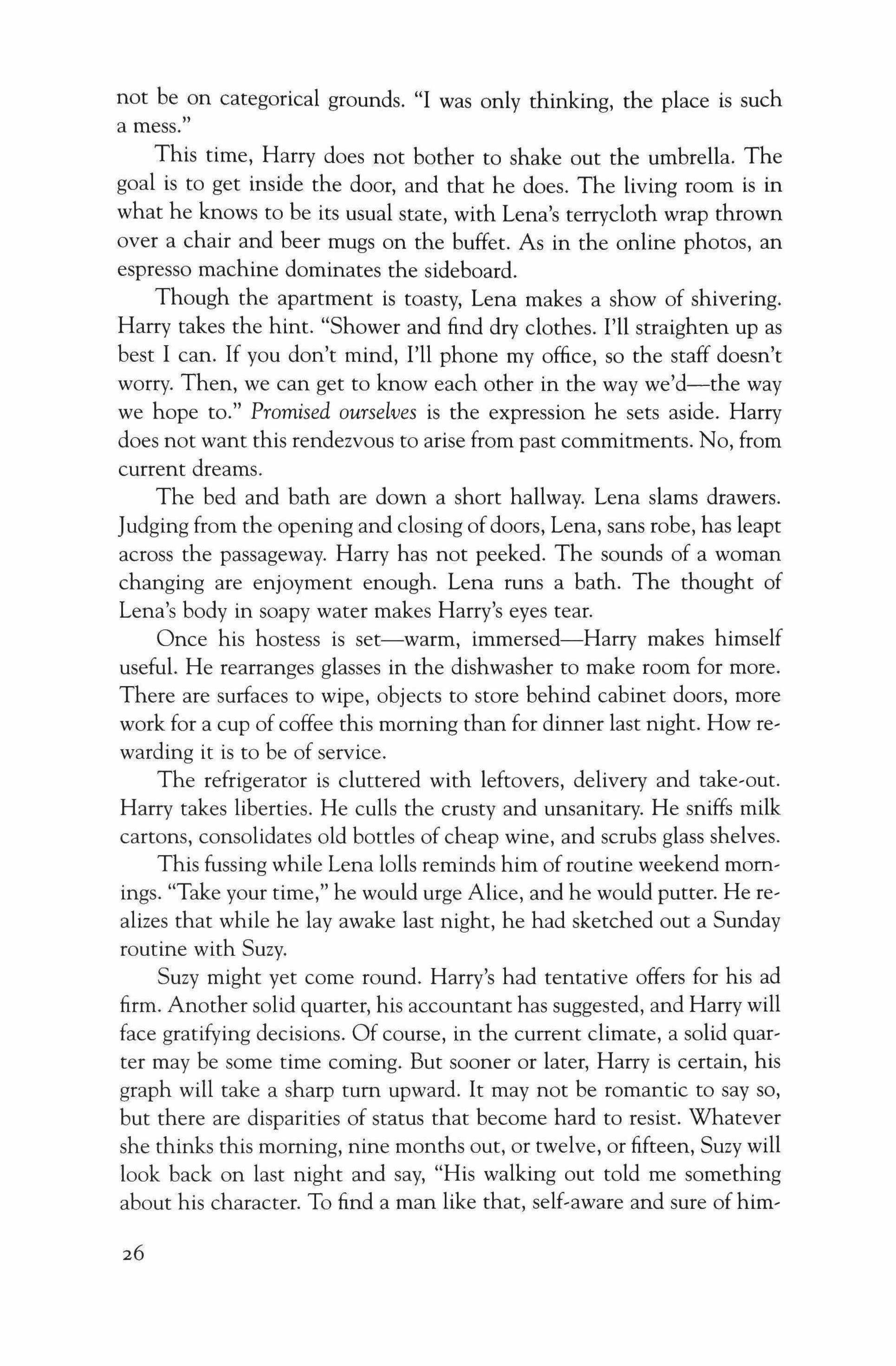
not be on categorical grounds. "I was only thinking, the place is such a mess."
This time, Harry does not bother to shake out the umbrella. The goal is to get inside the door, and that he does. The living room is in what he knows to be its usual state, with Lena's terrycloth wrap thrown over a chair and beer mugs on the buffet. As in the online photos, an espresso machine dominates the sideboard.
Though the apartment is toasty, Lena makes a show of shivering. Harry takes the hint. "Shower and find dry clothes. I'll straighten up as best I can. If you don't mind, I'll phone my office, so the staff doesn't worry. Then, we can get to know each other in the way we'd-the way we hope to." Promised ourselves is the expression he sets aside. Harry does not want this rendezvous to arise from past commitments. No, from current dreams.
The bed and bath are down a short hallway. Lena slams drawers. Judging from the opening and closing ofdoors, Lena, sans robe, has leapt across the passageway. Harry has not peeked. The sounds of a woman changing are enjoyment enough. Lena runs a bath. The thought of Lena's body in soapy water makes Harry's eyes tear.
Once his hostess is set-warm, immersed-Harry makes himself useful. He rearranges glasses in the dishwasher to make room for more. There are surfaces to wipe, objects to store behind cabinet doors, more work for a cup of coffee this morning than for dinner last night. How rewarding it is to be of service.
The refrigerator is cluttered with leftovers, delivery and take-out. Harry takes liberties. He culls the crusty and unsanitary. He sniffs milk cartons, consolidates old bottles of cheap wine, and scrubs glass shelves.
This fussing while Lena lolls reminds him of routine weekend rnomings. "Take your time," he would urge Alice, and he would putter. He realizes that while he lay awake last night, he had sketched out a Sunday routine with Suzy.
Suzy might yet come round. Harry's had tentative offers for his ad firm. Another solid quarter, his accountant has suggested, and Harry will face gratifying decisions. Of course, in the current climate, a solid quarter may be some time coming. But sooner or later, Harry is certain, his graph will take a sharp tum upward. It may not be romantic to say so, but there are disparities of status that become hard to resist. Whatever she thinks this morning, nine months out, or twelve, or fifteen, Suzy will look back on last night and say, "His walking out told me something about his character. To find a man like that, self-aware and sure of him-
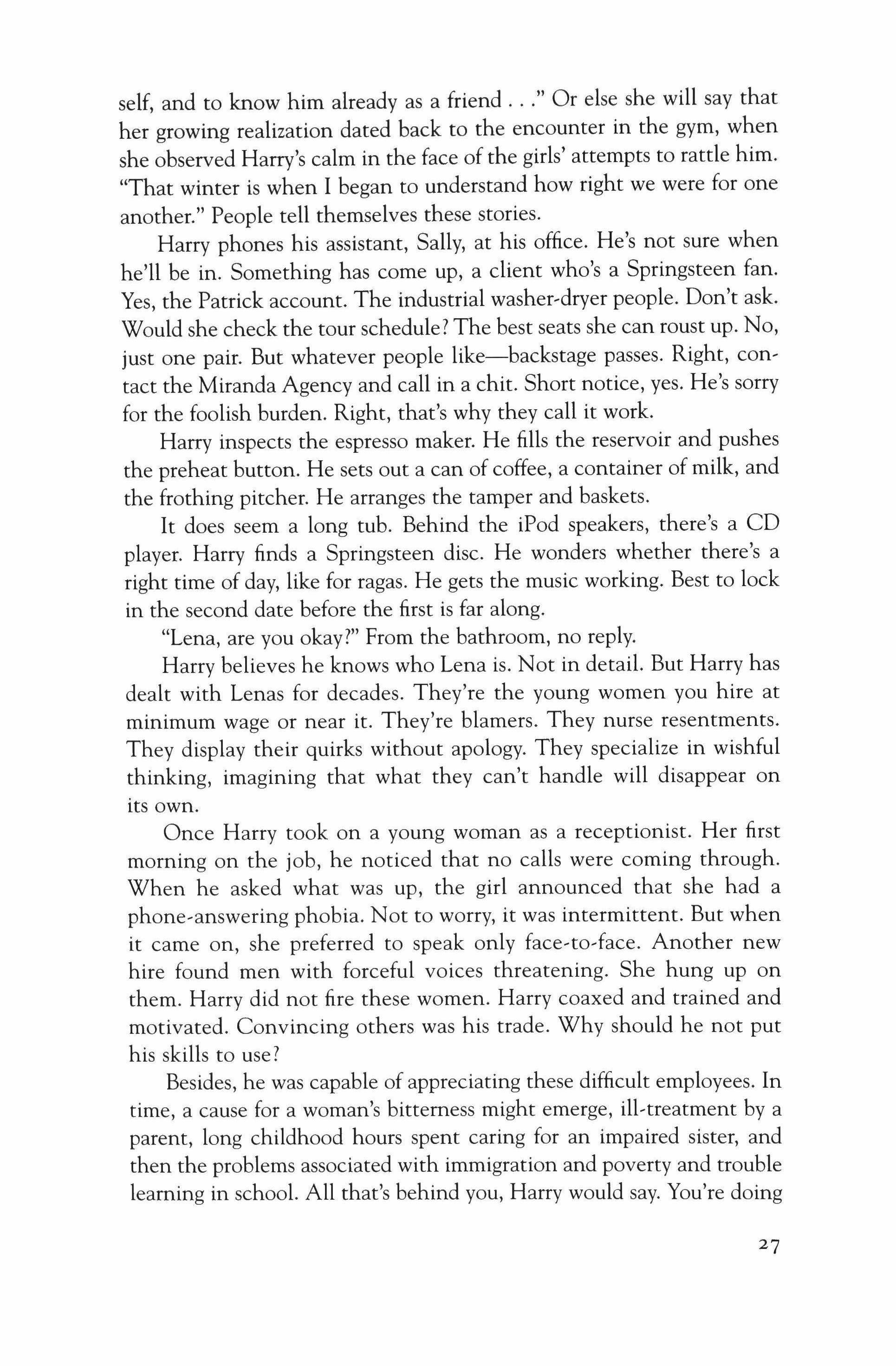
self, and to know him already as a friend " Or else she will say that her growing realization dated back to the encounter in the gym, when she observed Harry's calm in the face of the girls' attempts to rattle him. "That winter is when I began to understand how right we were for one another." People tell themselves these stories.
Harry phones his assistant, Sally, at his office. He's not sure when he'll be in. Something has come up, a client who's a Springsteen fan. Yes, the Patrick account. The industrial washer-dryer people. Don't ask. Would she check the tour schedule? The best seats she can roust up. No, just one pair. But whatever people like-backstage passes. Right, contact the Miranda Agency and call in a chit. Short notice, yes. He's sorry for the foolish burden. Right, that's why they call it work.
Harry inspects the espresso maker. He fills the reservoir and pushes the preheat button. He sets out a can of coffee, a container of milk, and the frothing pitcher. He arranges the tamper and baskets.
It does seem a long tub. Behind the iPod speakers, there's a CD player. Harry finds a Springsteen disc. He wonders whether there's a right time of day, like for ragas. He gets the music working. Best to lock in the second date before the first is far along.
"Lena, are you okay?" From the bathroom, no reply.
Harry believes he knows who Lena is. Not in detail. But Harry has dealt with Lenas for decades. They're the young women you hire at minimum wage or near it. They're blamers. They nurse resentments. They display their quirks without apology. They specialize in wishful thinking, imagining that what they can't handle will disappear on its own.
Once Harry took on a young woman as a receptionist. Her first morning on the job, he noticed that no calls were coming through. When he asked what was up, the girl announced that she had a phone-answering phobia. Not to worry, it was intermittent. But when it came on, she preferred to speak only face-to-face. Another new hire found men with forceful voices threatening. She hung up on them. Harry did not fire these women. Harry coaxed and trained and motivated. Convincing others was his trade. Why should he not put his skills to use?
Besides, he was capable of appreciating these difficult employees. In time, a cause for a woman's bitterness might emerge, ill-treatment by a parent, long childhood hours spent caring for an impaired sister, and then the problems associated with immigration and poverty and trouble learning in school. All that's behind you, Harry would say. You're doing
27
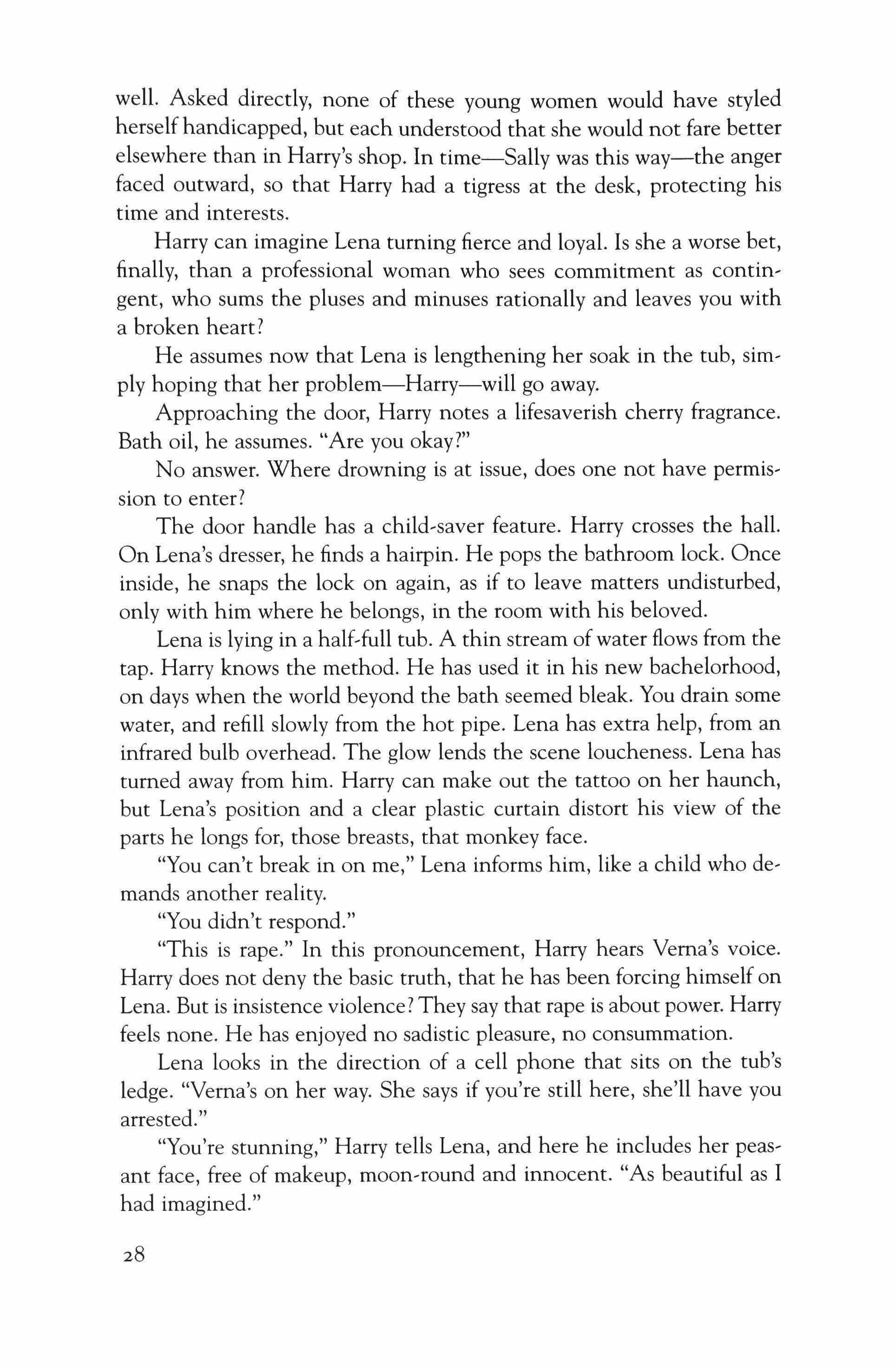
well. Asked directly, none of these young women would have styled herself handicapped, but each understood that she would not fare better elsewhere than in Harry's shop. In time-Sally was this way-the anger faced outward, so that Harry had a tigress at the desk, protecting his time and interests.
Harry can imagine Lena turning fierce and loyal. Is she a worse bet, finally, than a professional woman who sees commitment as contingent, who sums the pluses and minuses rationally and leaves you with a broken heart?
He assumes now that Lena is lengthening her soak in the tub, simply hoping that her problem-Harry-will go away.
Approaching the door, Harry notes a lifesaverish cherry fragrance. Bath oil, he assumes. "Are you okay?"
No answer. Where drowning is at issue, does one not have permission to enter?
The door handle has a child-saver feature. Harry crosses the hall. On Lena's dresser, he finds a hairpin. He pops the bathroom lock. Once inside, he snaps the lock on again, as if to leave matters undisturbed, only with him where he belongs, in the room with his beloved.
Lena is lying in a half-full tub. A thin stream of water flows from the tap. Harry knows the method. He has used it in his new bachelorhood, on days when the world beyond the bath seemed bleak. You drain some water, and refill slowly from the hot pipe. Lena has extra help, from an infrared bulb overhead. The glow lends the scene loucheness. Lena has turned away from him. Harry can make out the tattoo on her haunch, but Lena's position and a clear plastic curtain distort his view of the parts he longs for, those breasts, that monkey face.
"You can't break in on me," Lena informs him, like a child who demands another reality.
"You didn't respond."
"This is rape." In this pronouncement, Harry hears Vema's voice. Harry does not deny the basic truth, that he has been forcing himself on Lena. But is insistence violence? They say that rape is about power. Harry feels none. He has enjoyed no sadistic pleasure, no consummation.
Lena looks in the direction of a cell phone that sits on the tub's ledge. "Verna's on her way. She says if you're still here, she'll have you arrested."
"You're stunning," Harry tells Lena, and here he includes her peasant face, free of makeup, moon-round and innocent. "As beautiful as I had imagined."
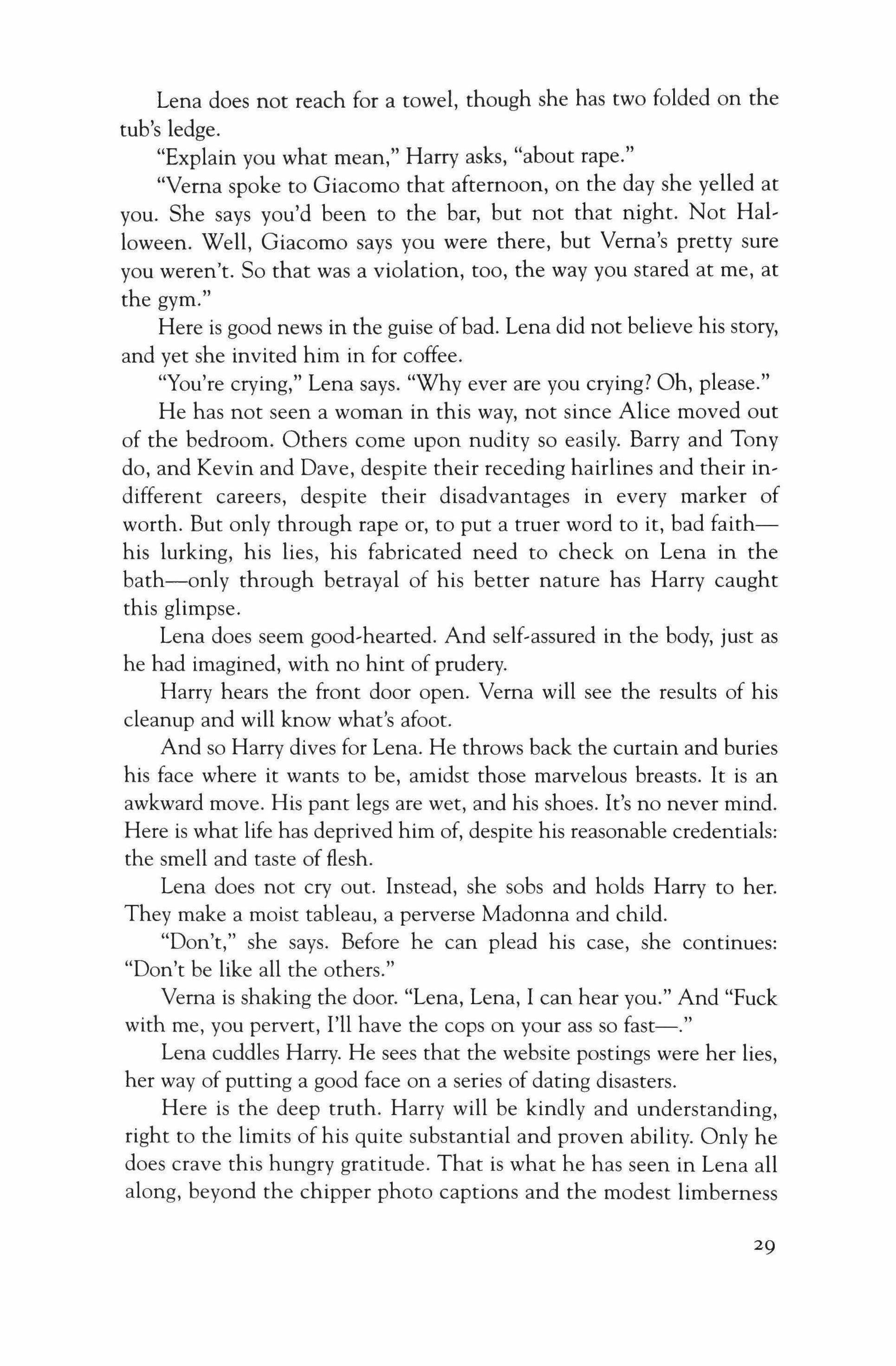
Lena does not reach for a towel, though she has two folded on the tub's ledge.
"Explain you what mean," Harry asks, "about rape."
"Verna spoke to Giacomo that afternoon, on the day she yelled at you. She says you'd been to the bar, but not that night. Not Halloween. Well, Giacomo says you were there, but Verna's pretty sure you weren't. So that was a violation, too, the way you stared at me, at the gym."
Here is good news in the guise ofbad. Lena did not believe his story, and yet she invited him in for coffee.
"You're crying," Lena says. "Why ever are you crying? Oh, please."
He has not seen a woman in this way, not since Alice moved out of the bedroom. Others come upon nudity so easily. Barry and Tony do, and Kevin and Dave, despite their receding hairlines and their indifferent careers, despite their disadvantages in every marker of worth. But only through rape or, to put a truer word to it, bad faithhis lurking, his lies, his fabricated need to check on Lena in the bath-only through betrayal of his better nature has Harry caught this glimpse.
Lena does seem good-hearted, And self-assured in the body, just as he had imagined, with no hint of prudery.
Harry hears the front door open. Verna will see the results of his cleanup and will know what's afoot.
And so Harry dives for Lena. He throws back the curtain and buries his face where it wants to be, amidst those marvelous breasts. It is an awkward move. His pant legs are wet, and his shoes. It's no never mind. Here is what life has deprived him of, despite his reasonable credentials: the smell and taste of flesh.
Lena does not cry out. Instead, she sobs and holds Harry to her. They make a moist tableau, a perverse Madonna and child.
"Don't," she says. Before he can plead his case, she continues: "Don't be like all the others."
Vema is shaking the door. "Lena, Lena, I can hear you." And "Fuck with me, you pervert, I'll have the cops on your ass so fast-."
Lena cuddles Harry. He sees that the website postings were her lies, her way of putting a good face on a series of dating disasters.
Here is the deep truth. Harry will be kindly and understanding, right to the limits of his quite substantial and proven ability. Only he does crave this hungry gratitude. That is what he has seen in Lena all along, beyond the chipper photo captions and the modest limberness
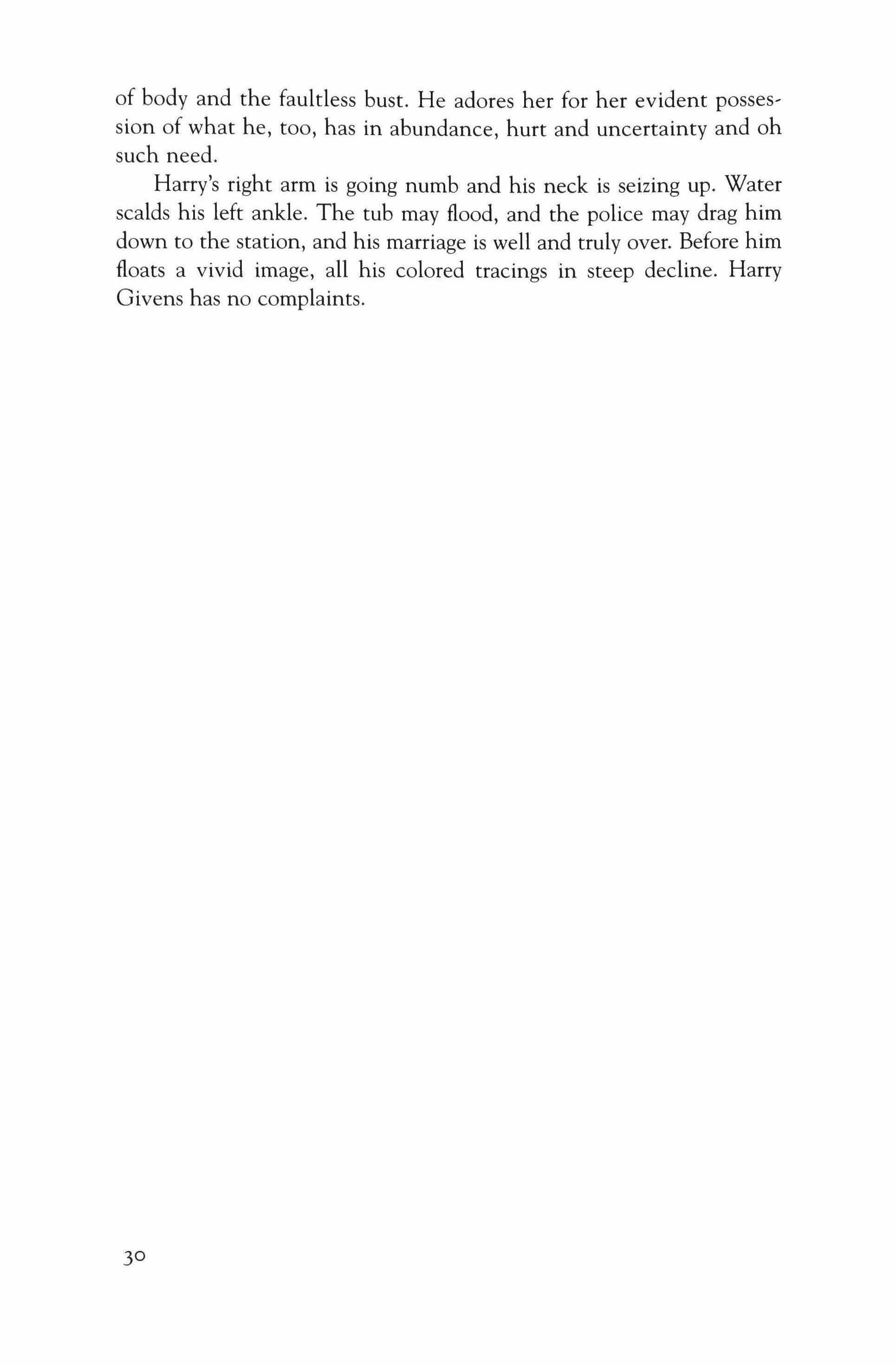
of body and the faultless bust. He adores her for her evident possession of what he, too, has in abundance, hurt and uncertainty and oh such need.
Harry's right arm is going numb and his neck is seizing up. Water scalds his left ankle. The tub may flood, and the police may drag him down to the station, and his marriage is well and truly over. Before him floats a vivid image, all his colored tracings in steep decline. Harry Givens has no complaints.
30
Richard Burgin
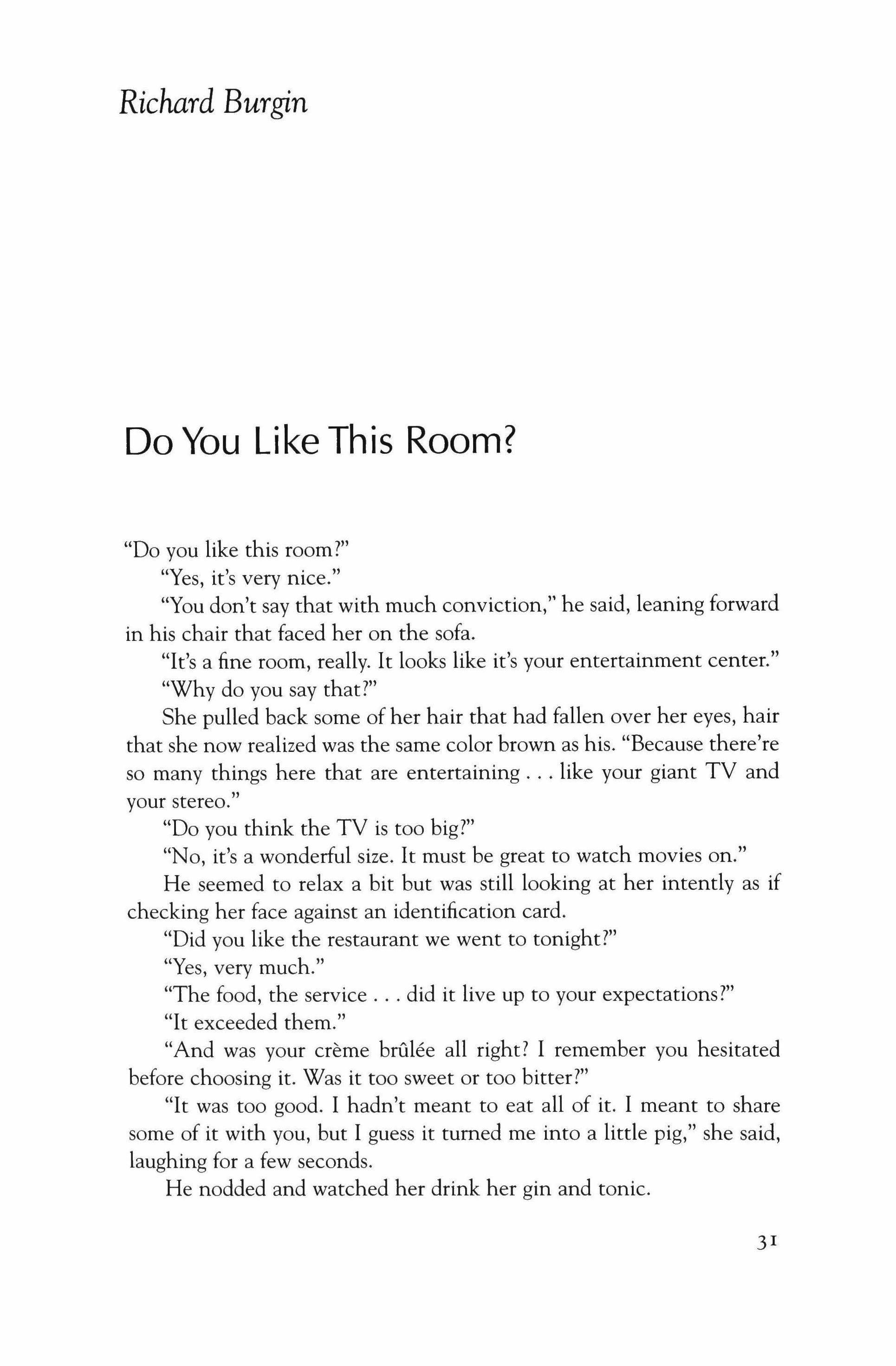
Do You Like This Room?
"Do you like this room?"
"Yes, it's very nice."
"You don't say that with much conviction," he said, leaning forward in his chair that faced her on the sofa.
"It's a fine room, really. It looks like it's your entertainment center."
"Why do you say that?"
She pulled back some of her hair that had fallen over her eyes, hair that she now realized was the same color brown as his. "Because there're so many things here that are entertaining like your giant TV and your stereo."
"Do you think the TV is too big?"
"No, it's a wonderful size. It must be great to watch movies on."
He seemed to relax a bit but was still looking at her intently as if checking her face against an identification card.
"Did you like the restaurant we went to tonight?"
"Yes, very much."
"The food, the service did it live up to your expectations?"
"It exceeded them."
"And was your creme brulee all right? I remember you hesitated before choosing it. Was it too sweet or too bitter?"
"It was too good. I hadn't meant to eat all of it. I meant to share some of it with you, but I guess it turned me into a little pig," she said, laughing for a few seconds.
He nodded and watched her drink her gin and tonic.
31
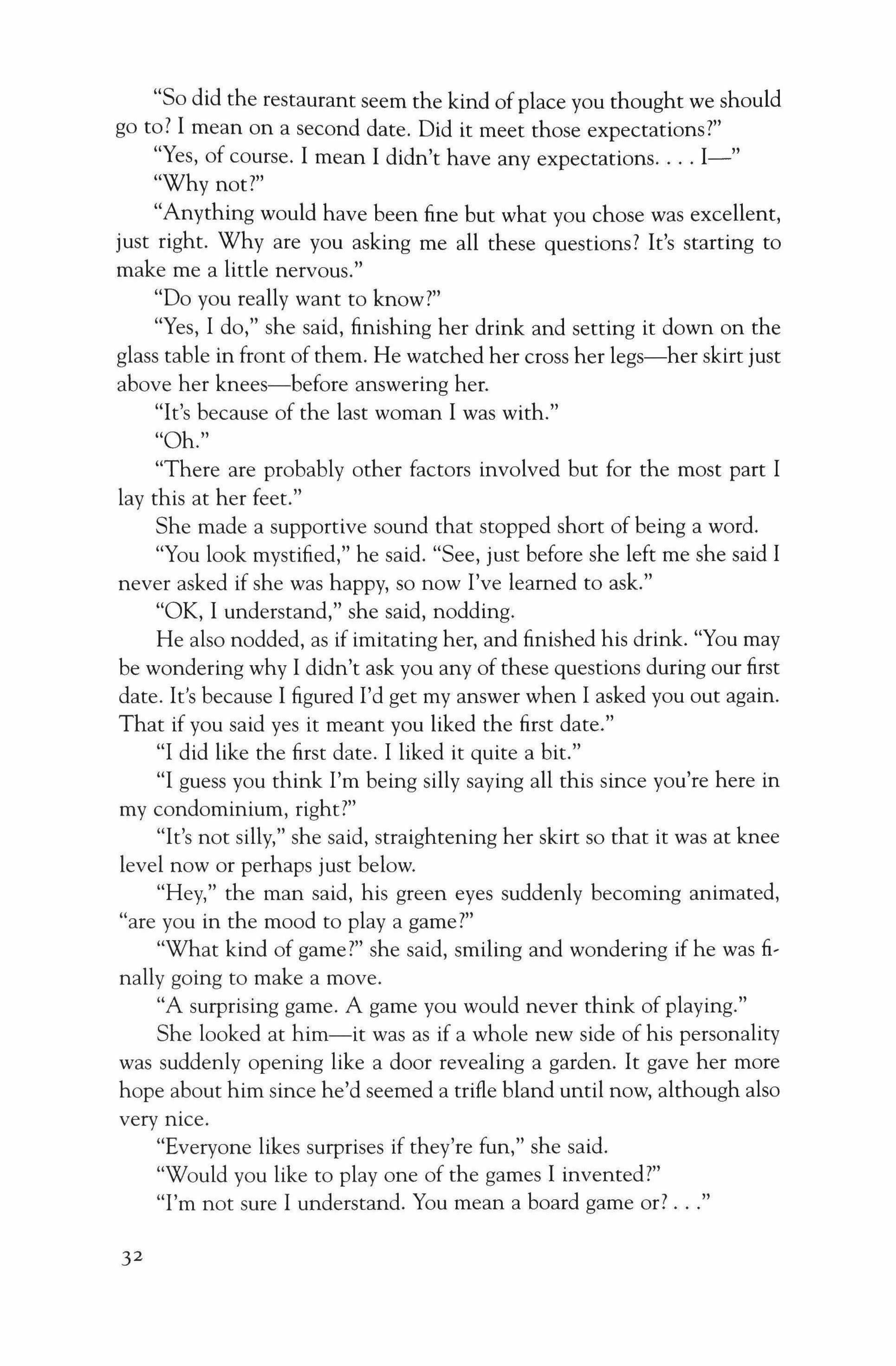
"So did the restaurant seem the kind ofplace you thought we should go to? I mean on a second date. Did it meet those expectations?"
"Yes, of course. I mean I didn't have any expectations 1-"
"Why not?"
"Anything would have been fine but what you chose was excellent, just right. Why are you asking me all these questions? It's starting to make me a little nervous."
"Do you really want to know?"
"Yes, I do," she said, finishing her drink and setting it down on the glass table in front of them. He watched her cross her legs-her skirt just above her knees-before answering her.
"It's because of the last woman I was with."
"Oh."
"There are probably other factors involved but for the most part I lay this at her feet."
She made a supportive sound that stopped short of being a word.
"You look mystified," he said. "See, just before she left me she said I never asked if she was happy, so now I've learned to ask."
"OK, I understand," she said, nodding.
He also nodded, as if imitating her, and finished his drink. "You may be wondering why I didn't ask you any of these questions during our first date. It's because I figured I'd get my answer when I asked you out again. That if you said yes it meant you liked the first date."
"I did like the first date. I liked it quite a bit."
"I guess you think I'm being silly saying all this since you're here in my condominium, right?"
"It's not silly," she said, straightening her skirt so that it was at knee level now or perhaps just below.
"Hey," the man said, his green eyes suddenly becoming animated, "are you in the mood to playa game?"
"What kind of game?" she said, smiling and wondering if he was finally going to make a move.
"A surprising game. A game you would never think of playing."
She looked at him-it was as if a whole new side of his personality was suddenly opening like a door revealing a garden. It gave her more hope about him since he'd seemed a trifle bland until now, although also very nice.
"Everyone likes surprises if they're fun," she said.
"Would you like to play one of the games I invented?"
"I'm not sure I understand. You mean a board game or? "
32
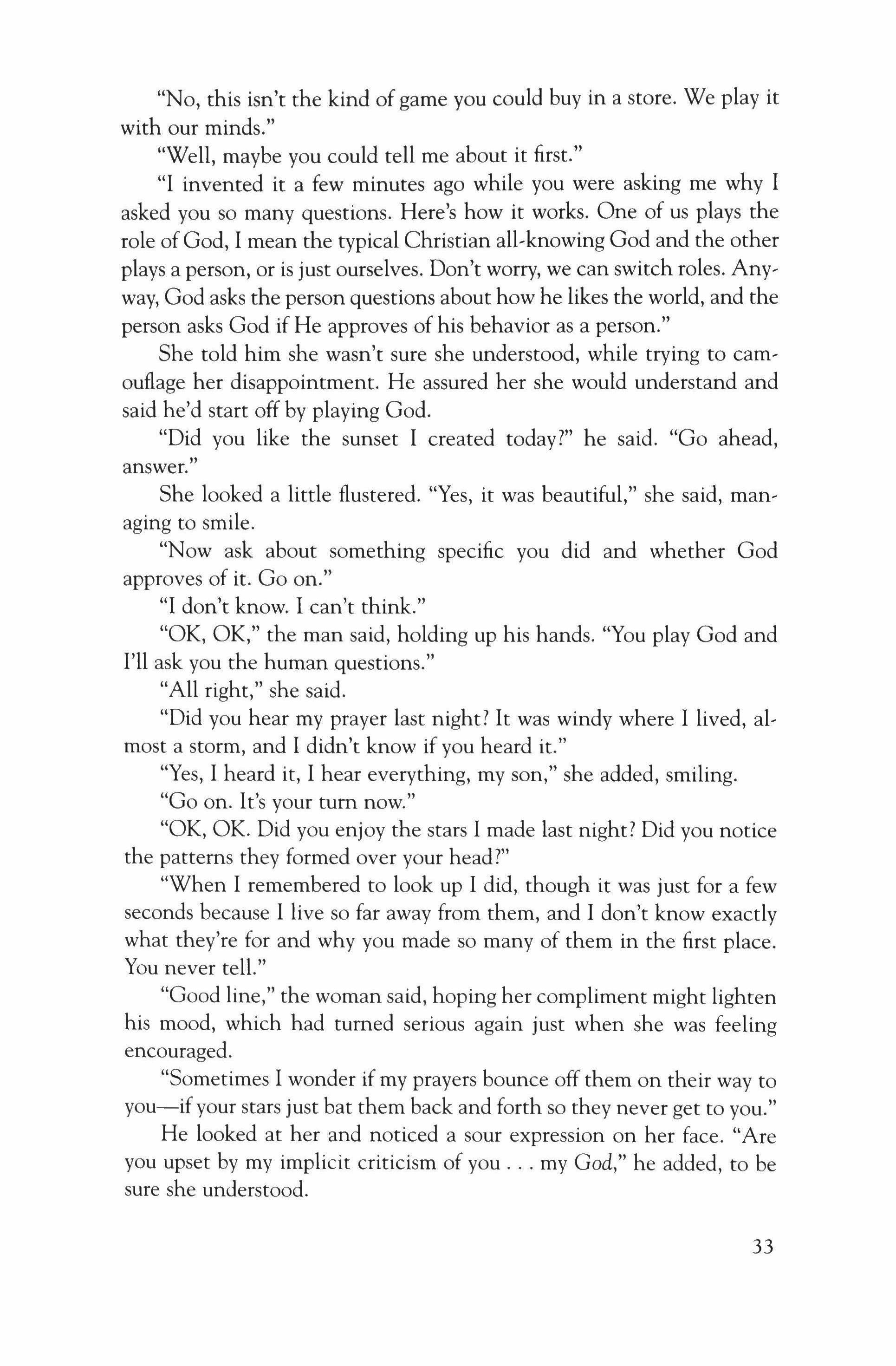
"No, this isn't the kind of game you could buy in a store. We play it with our minds."
"Well, maybe you could tell me about it first."
"I invented it a few minutes ago while you were asking me why I asked you so many questions. Here's how it works. One of us plays the role of God, I mean the typical Christian all-knowing God and the other plays a person, or is just ourselves. Don't worry, we can switch roles. Anyway, God asks the person questions about how he likes the world, and the person asks God if He approves of his behavior as a person."
She told him she wasn't sure she understood, while trying to camouflage her disappointment. He assured her she would understand and said he'd start off by playing God.
"Did you like the sunset I created today?" he said. "Go ahead, answer."
She looked a little flustered. "Yes, it was beautiful," she said, managing to smile.
"Now ask about something specific you did and whether God approves of it. Go on."
"I don't know. I can't think."
"OK, OK," the man said, holding up his hands. "You play God and I'll ask you the human questions."
"All right," she said.
"Did you hear my prayer last night? It was windy where I lived, almost a storm, and I didn't know if you heard it."
"Yes, I heard it, I hear everything, my son," she added, smiling.
"Go on. It's your tum now."
"OK, OK. Did you enjoy the stars I made last night? Did you notice the patterns they formed over your head?"
"When I remembered to look up I did, though it was just for a few seconds because I live so far away from them, and I don't know exactly what they're for and why you made so many of them in the first place. You never tell."
"Good line," the woman said, hoping her compliment might lighten his mood, which had turned serious again just when she was feeling encouraged.
"Sometimes I wonder if my prayers bounce off them on their way to you-ifyour stars just bat them back and forth so they never get to you."
He looked at her and noticed a sour expression on her face. "Are you upset by my implicit criticism of you my God," he added, to be sure she understood.
33
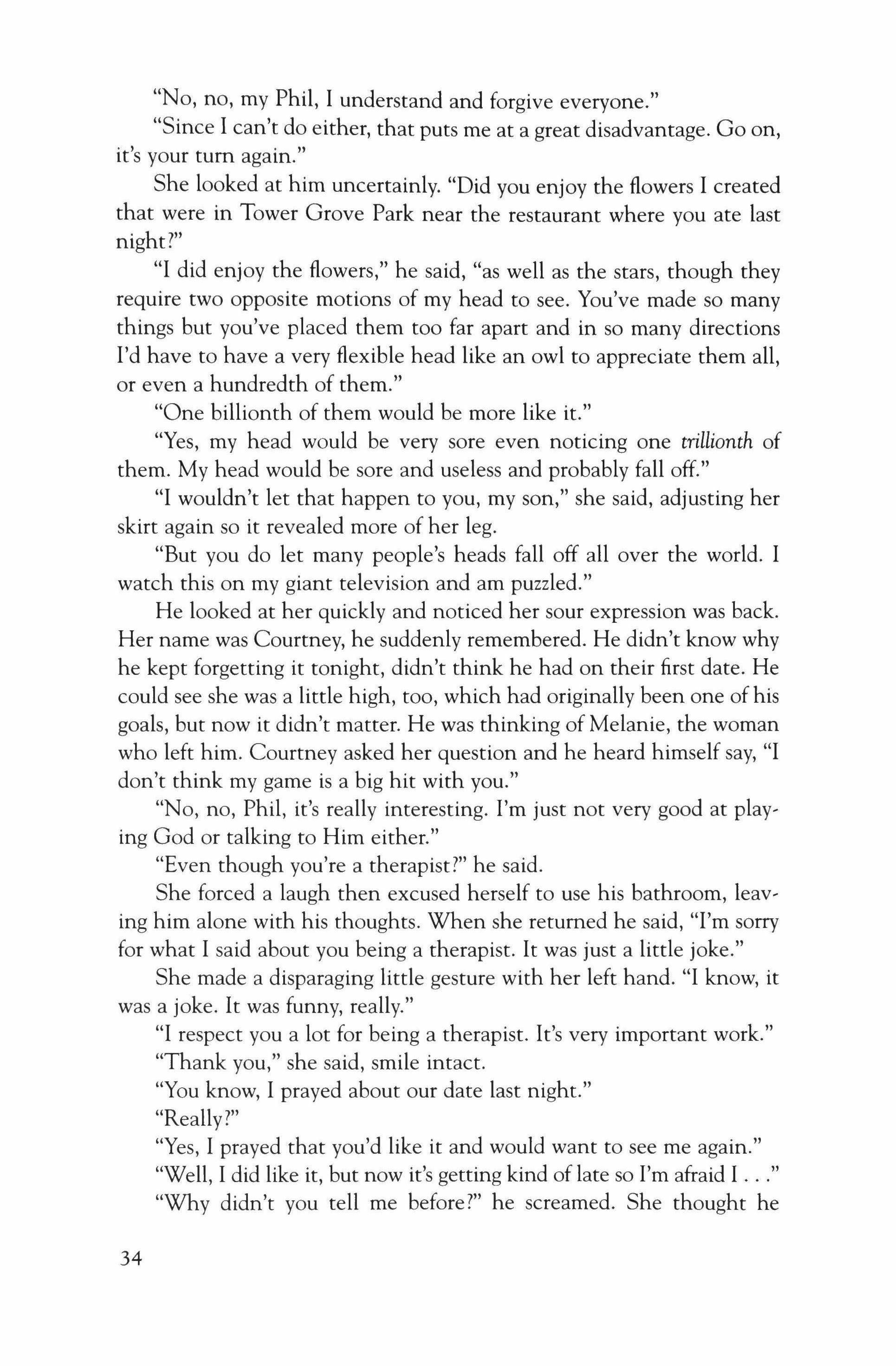
"No, no, my Phil, I understand and forgive everyone."
"Since I can't do either, that puts me at a great disadvantage. Go on, it's your tum again."
She looked at him uncertainly. "Did you enjoy the flowers I created that were in Tower Grove Park near the restaurant where you ate last night?"
"I did enjoy the flowers," he said, "as well as the stars, though they require two opposite motions of my head to see. You've made so many things but you've placed them too far apart and in so many directions I'd have to have a very flexible head like an owl to appreciate them all, or even a hundredth of them."
"One billionth of them would be more like it."
"Yes, my head would be very sore even noticing one trillionth of them. My head would be sore and useless and probably fall off."
"I wouldn't let that happen to you, my son," she said, adjusting her skirt again so it revealed more of her leg.
"But you do let many people's heads fall off all over the world. I watch this on my giant television and am puzzled."
He looked at her quickly and noticed her sour expression was back. Her name was Courtney, he suddenly remembered. He didn't know why he kept forgetting it tonight, didn't think he had on their first date. He could see she was a little high, too, which had originally been one of his goals, but now it didn't matter. He was thinking of Melanie, the woman who left him. Courtney asked her question and he heard himself say, "I don't think my game is a big hit with you."
"No, no, Phil, it's really interesting. I'm just not very good at playing God or talking to Him either."
"Even though you're a therapist?" he said.
She forced a laugh then excused herself to use his bathroom, leaving him alone with his thoughts. When she returned he said, "I'm sorry for what I said about you being a therapist. It was just a little joke."
She made a disparaging little gesture with her left hand. "I know, it was a joke. It was funny, really."
"I respect you a lot for being a therapist. It's very important work."
"Thank you," she said, smile intact.
"You know, I prayed about our date last night." "Really?"
"Yes, I prayed that you'd like it and would want to see me again."
"Well, I did like it, but now it's getting kind of late so I'm afraid I
"Why didn't you tell me before?" he screamed. She thought he
34
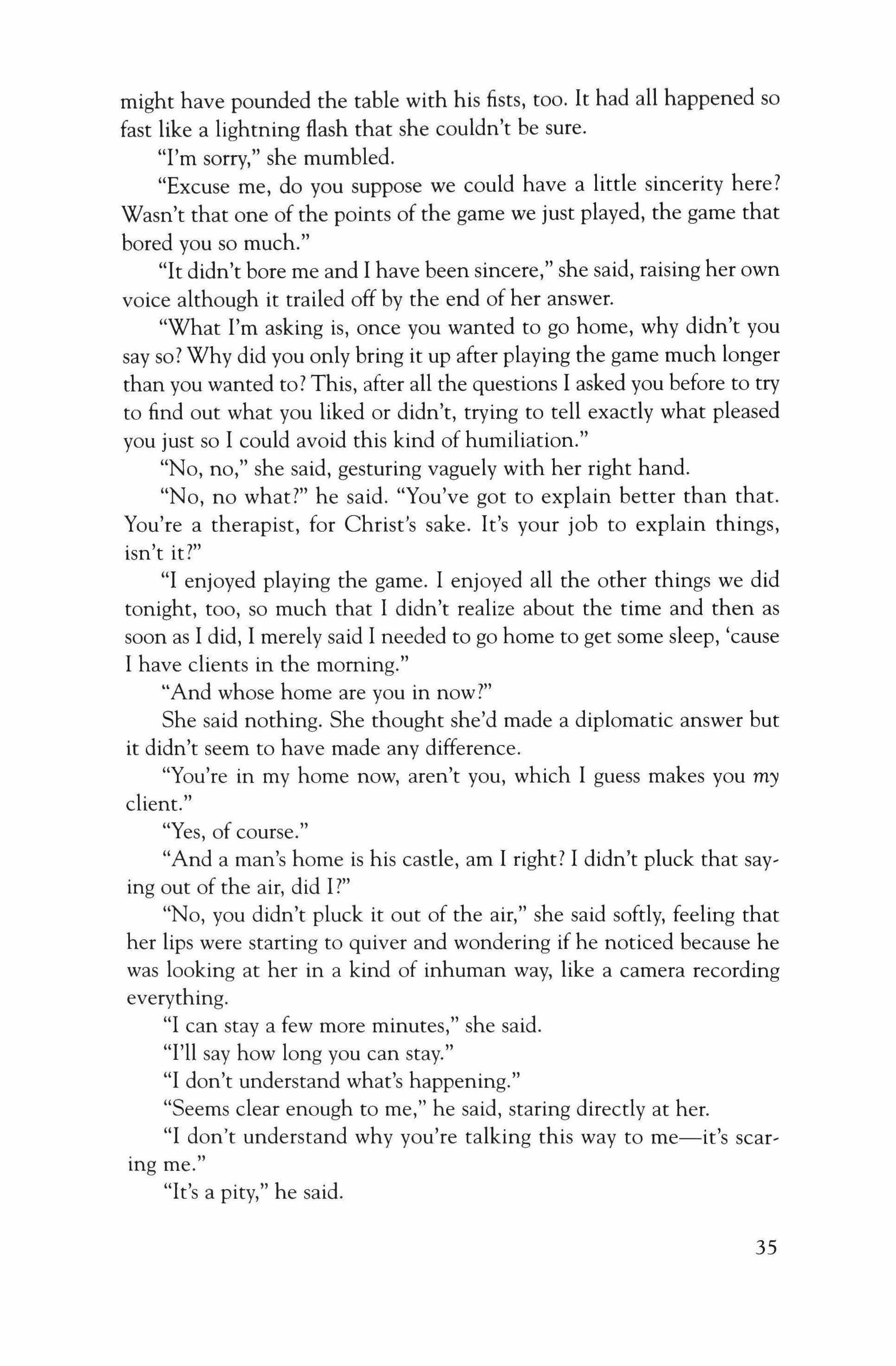
might have pounded the table with his fists, too. It had all happened so fast like a lightning flash that she couldn't be sure.
"I'm sorry," she mumbled.
"Excuse me, do you suppose we could have a little sincerity here? Wasn't that one of the points of the game we just played, the game that bored you so much."
"It didn't bore me and I have been sincere," she said, raising her own voice although it trailed off by the end of her answer.
"What I'm asking is, once you wanted to go home, why didn't you say so? Why did you only bring it up after playing the game much longer than you wanted to? This, after all the questions I asked you before to try to find out what you liked or didn't, trying to tell exactly what pleased you just so I could avoid this kind of humiliation."
"No, no," she said, gesturing vaguely with her right hand.
"No, no what?" he said. "You've got to explain better than that. You're a therapist, for Christ's sake. It's your job to explain things, isn't it?"
"I enjoyed playing the game. I enjoyed all the other things we did tonight, too, so much that I didn't realize about the time and then as soon as I did, I merely said I needed to go home to get some sleep, 'cause I have clients in the morning."
"And whose home are you in now?"
She said nothing. She thought she'd made a diplomatic answer but it didn't seem to have made any difference.
"You're in my home now, aren't you, which I guess makes you my client."
"Yes, of course."
"And a man's home is his castle, am I right? I didn't pluck that saying out of the air, did I?"
"No, you didn't pluck it out of the air," she said softly, feeling that her lips were starting to quiver and wondering if he noticed because he was looking at her in a kind of inhuman way, like a camera recording everything.
"I can stay a few more minutes," she said.
"I'll say how long you can stay."
"I don't understand what's happening."
"Seems clear enough to me," he said, staring directly at her.
"I don't understand why you're talking this way to me-it's scaring me."
"It's a pity," he said.
35
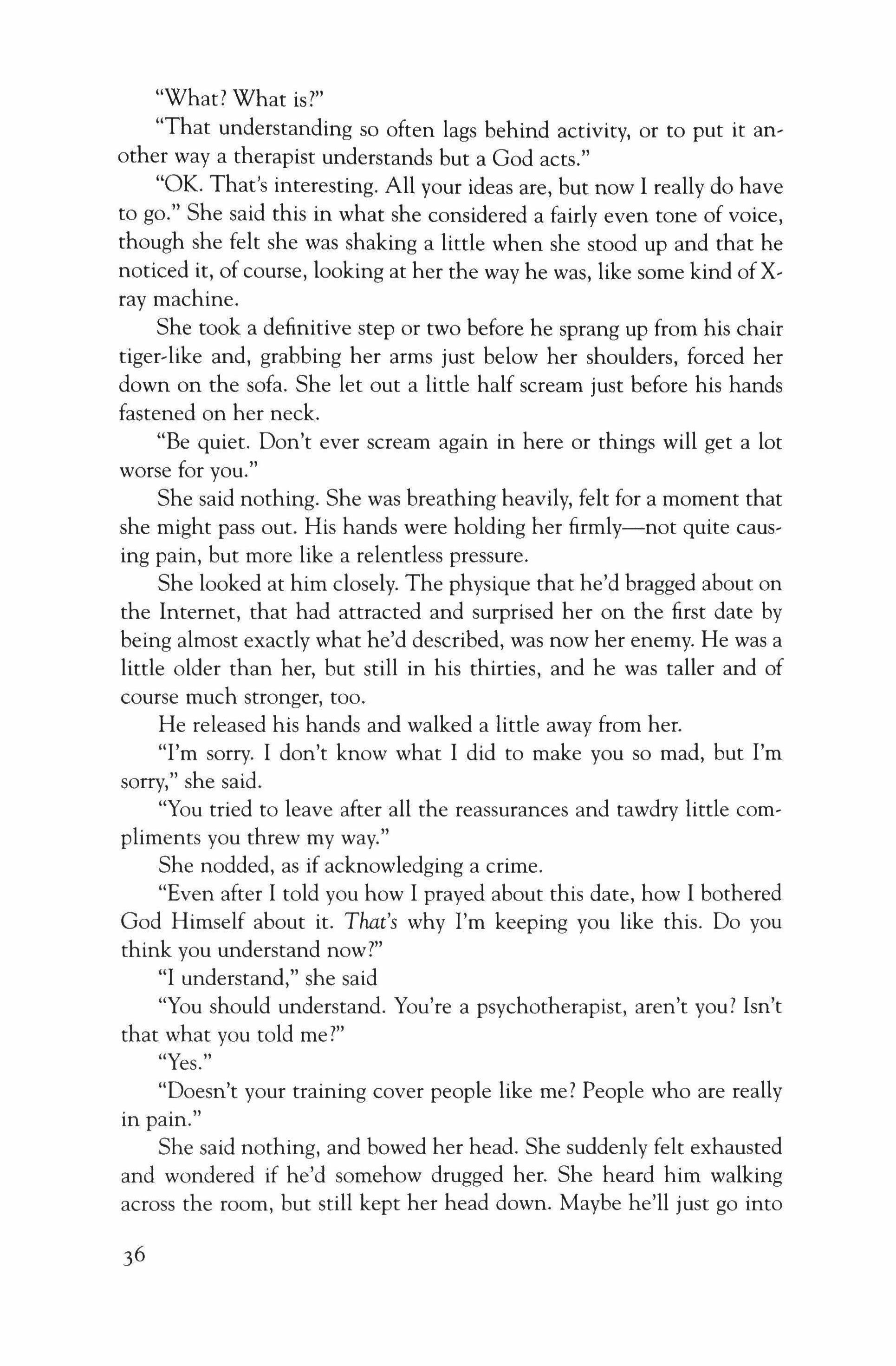
"What? What is?"
"That understanding so often lags behind activity, or to put it another way a therapist understands but a God acts."
"OK. That's interesting. All your ideas are, but now I really do have to go." She said this in what she considered a fairly even tone of voice, though she felt she was shaking a little when she stood up and that he noticed it, of course, looking at her the way he was, like some kind of X� ray machine.
She took a definitive step or two before he sprang up from his chair tiger-like and, grabbing her arms just below her shoulders, forced her down on the sofa. She let out a little half scream just before his hands fastened on her neck.
"Be quiet. Don't ever scream again in here or things will get a lot worse for you."
She said nothing. She was breathing heavily, felt for a moment that she might pass out. His hands were holding her firmly-not quite causing pain, but more like a relentless pressure.
She looked at him closely. The physique that he'd bragged about on the Internet, that had attracted and surprised her on the first date by being almost exactly what he'd described, was now her enemy. He was a little older than her, but still in his thirties, and he was taller and of course much stronger, too.
He released his hands and walked a little away from her.
"I'm sorry. I don't know what I did to make you so mad, but I'm sorry," she said.
"You tried to leave after all the reassurances and tawdry little cornpliments you threw my way."
She nodded, as if acknowledging a crime.
"Even after I told you how I prayed about this date, how I bothered God Himself about it. That's why I'm keeping you like this. Do you think you understand now?"
"I understand," she said
"You should understand. You're a psychotherapist, aren't you? Isn't that what you told me?"
"Yes."
"Doesn't your training cover people like me? People who are really in pain."
She said nothing, and bowed her head. She suddenly felt exhausted and wondered if he'd somehow drugged her. She heard him walking across the room, but still kept her head down. Maybe he'll just go into
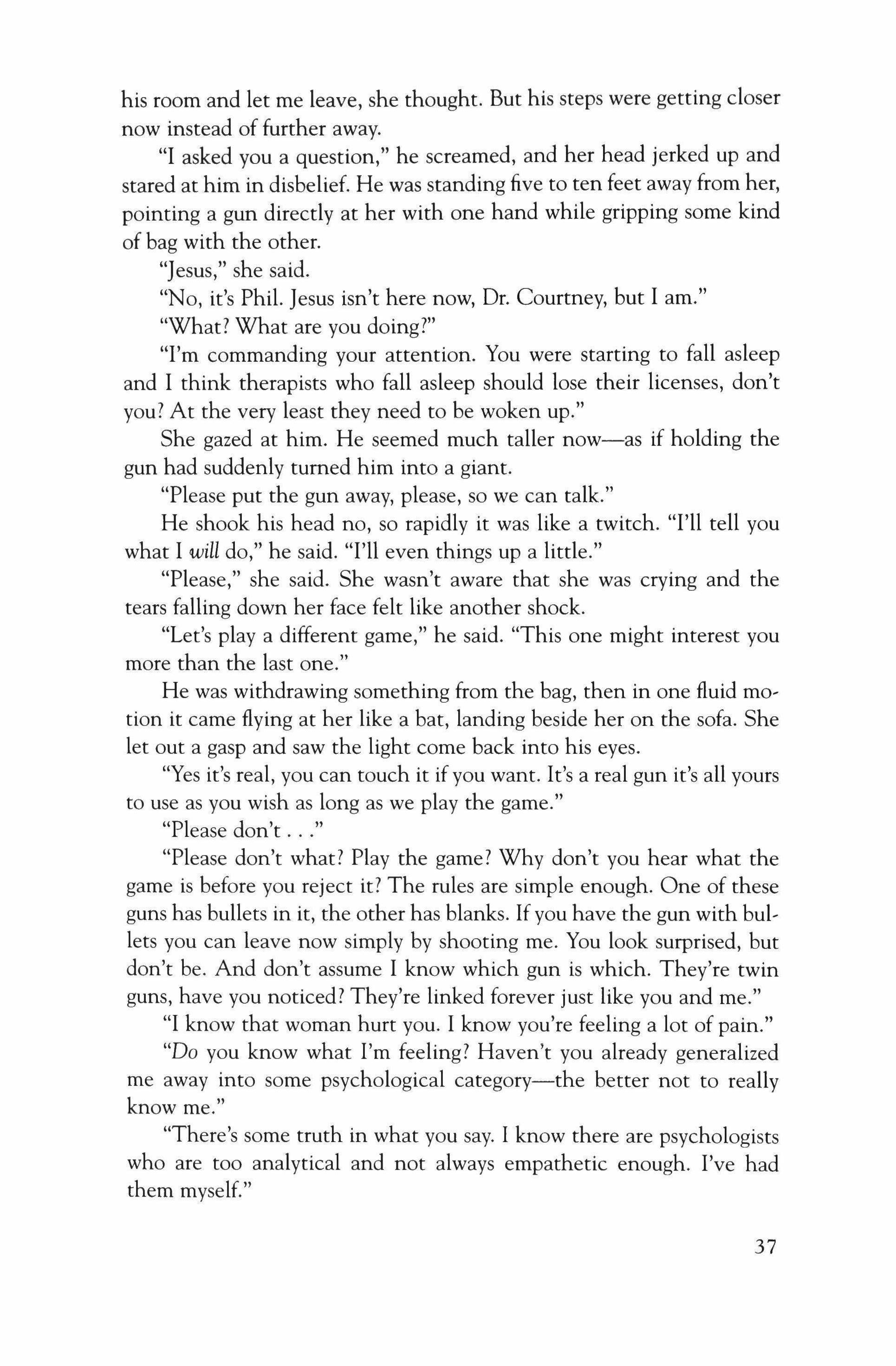
his room and let me leave, she thought. But his steps were getting closer now instead of further away.
"I asked you a question," he screamed, and her head jerked up and stared at him in disbelief. He was standing five to ten feet away from her, pointing a gun directly at her with one hand while gripping some kind of bag with the other.
"Jesus," she said.
"No, it's Phil. Jesus isn't here now, Dr. Courtney, but I am."
"What? What are you doing?"
"I'm commanding your attention. You were starting to fall asleep and I think therapists who fall asleep should lose their licenses, don't you? At the very least they need to be woken up."
She gazed at him. He seemed much taller now-as if holding the gun had suddenly turned him into a giant.
"Please put the gun away, please, so we can talk."
He shook his head no, so rapidly it was like a twitch. "I'll tell you what I will do," he said. "I'll even things up a little."
"Please," she said. She wasn't aware that she was crying and the tears falling down her face felt like another shock.
"Let's playa different game," he said. "This one might interest you more than the last one."
He was withdrawing something from the bag, then in one fluid motion it came flying at her like a bat, landing beside her on the sofa. She let out a gasp and saw the light come back into his eyes.
"Yes it's real, you can touch it if you want. It's a real gun it's all yours to use as you wish as long as we play the game."
"Please don't
"Please don't what? Play the game? Why don't you hear what the game is before you reject it? The rules are simple enough. One of these guns has bullets in it, the other has blanks. If you have the gun with bullets you can leave now simply by shooting me. You look surprised, but don't be. And don't assume I know which gun is which. They're twin guns, have you noticed? They're linked forever just like you and me."
"I know that woman hurt you. I know you're feeling a lot of pain."
"Do you know what I'm feeling? Haven't you already generalized me away into some psychological category-the better not to really know me."
"There's some truth in what you say. I know there are psychologists who are too analytical and not always empathetic enough. I've had them myself."
37
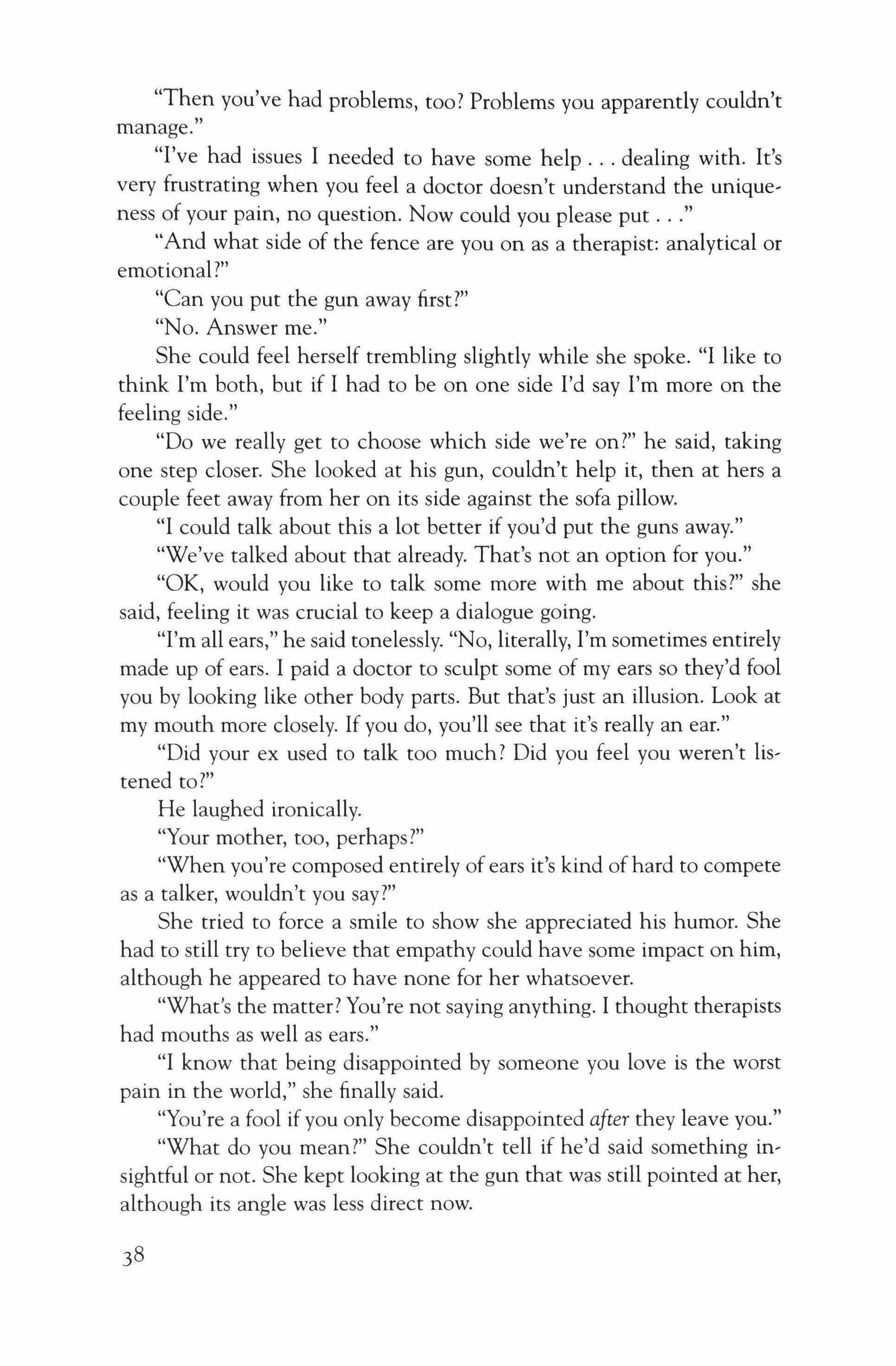
"Then you've had problems, too? Problems you apparently couldn't manage."
"I've had issues I needed to have some help dealing with. It's very frustrating when you feel a doctor doesn't understand the uniqueness of your pain, no question. Now could you please put "And what side of the fence are you on as a therapist: analytical or emotional?"
"Can you put the gun away first?"
"No. Answer me."
She could feel herself trembling slightly while she spoke. "I like to think I'm both, but if I had to be on one side I'd say I'm more on the feeling side."
"Do we really get to choose which side we're on?" he said, taking one step closer. She looked at his gun, couldn't help it, then at hers a couple feet away from her on its side against the sofa pillow.
"I could talk about this a lot better if you'd put the guns away."
"We've talked about that already. That's not an option for you."
"OK, would you like to talk some more with me about this?" she said, feeling it was crucial to keep a dialogue going.
"I'm all ears," he said tonelessly. "No, literally, I'm sometimes entirely made up of ears. I paid a doctor to sculpt some of my ears so they'd fool you by looking like other body parts. But that's just an illusion. Look at my mouth more closely. If you do, you'll see that it's really an ear."
"Did your ex used to talk too much? Did you feel you weren't listened to?"
He laughed ironically.
"Your mother, too, perhaps?"
"When you're composed entirely of ears it's kind of hard to compete as a talker, wouldn't you say?"
She tried to force a smile to show she appreciated his humor. She had to still try to believe that empathy could have some impact on him, although he appeared to have none for her whatsoever.
"What's the matter? You're not saying anything. I thought therapists had mouths as well as ears."
"I know that being disappointed by someone you love is the worst pain in the world," she finally said.
"You're a fool if you only become disappointed after they leave you."
"What do you mean?" She couldn't tell if he'd said something insightful or not. She kept looking at the gun that was still pointed at her, although its angle was less direct now.
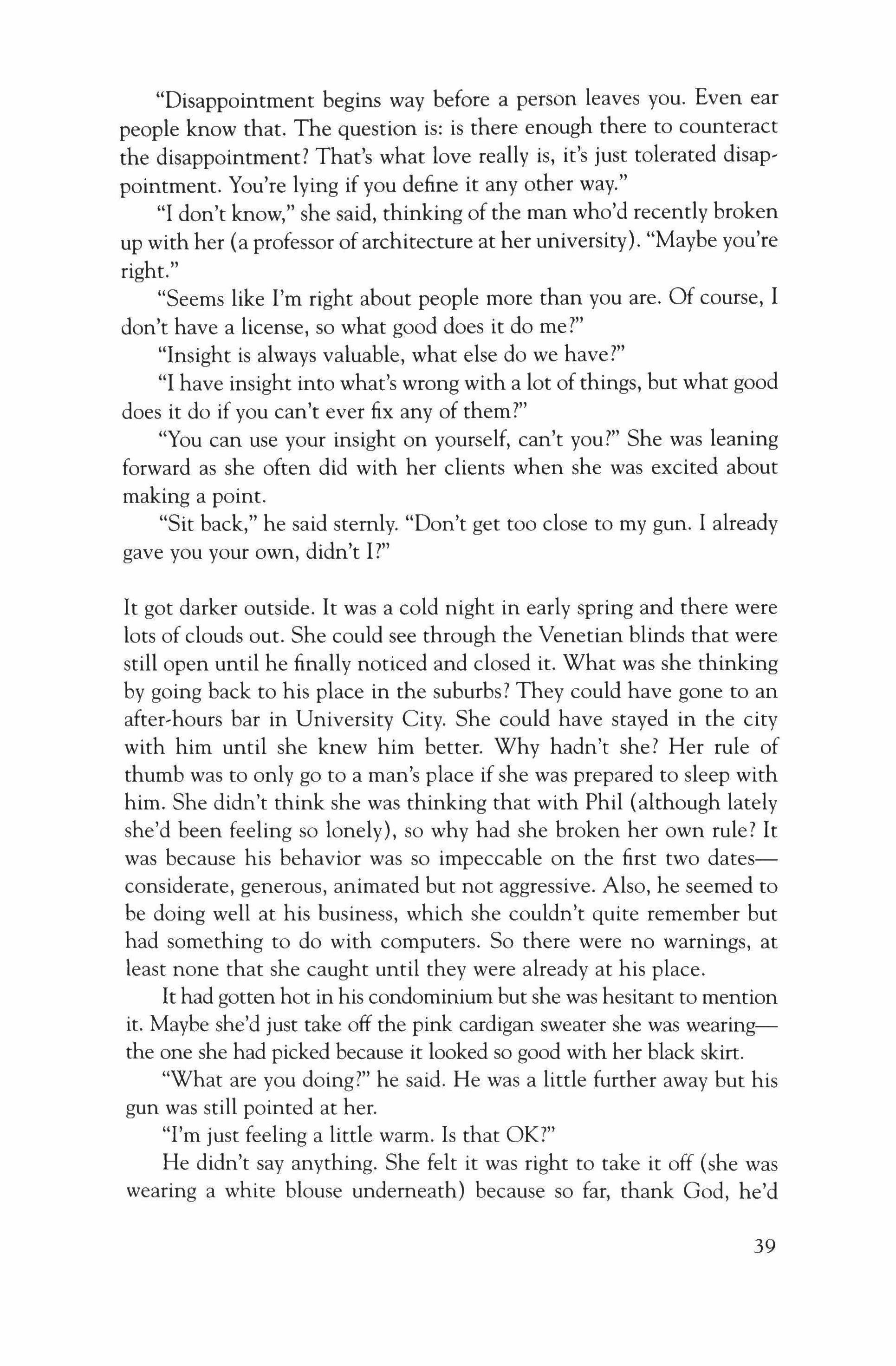
"Disappointment begins way before a person leaves you. Even ear people know that. The question is: is there enough there to counteract the disappointment? That's what love really is, it's just tolerated disappointment. You're lying if you define it any other way."
"I don't know," she said, thinking of the man who'd recently broken up with her {a professor of architecture at her university}. "Maybe you're right."
"Seems like I'm right about people more than you are. Of course, I don't have a license, so what good does it do me?"
"Insight is always valuable, what else do we have?"
"I have insight into what's wrong with a lot of things, but what good does it do if you can't ever fix any of them?"
"You can use your insight on yourself, can't you?" She was leaning forward as she often did with her clients when she was excited about making a point.
"Sit back," he said sternly. "Don't get too close to my gun. I already gave you your own, didn't I?"
It got darker outside. It was a cold night in early spring and there were lots of clouds out. She could see through the Venetian blinds that were still open until he finally noticed and closed it. What was she thinking by going back to his place in the suburbs? They could have gone to an after-hours bar in University City. She could have stayed in the city with him until she knew him better. Why hadn't she? Her rule of thumb was to only go to a man's place if she was prepared to sleep with him. She didn't think she was thinking that with Phil {although lately she'd been feeling so lonely}, so why had she broken her own rule? It was because his behavior was so impeccable on the first two datesconsiderate, generous, animated but not aggressive. Also, he seemed to be doing well at his business, which she couldn't quite remember but had something to do with computers. So there were no warnings, at least none that she caught until they were already at his place.
It had gotten hot in his condominium but she was hesitant to mention it. Maybe she'd just take off the pink cardigan sweater she was wearingthe one she had picked because it looked so good with her black skirt.
"What are you doing?" he said. He was a little further away but his gun was still pointed at her.
"I'm just feeling a little warm. Is that OK?"
He didn't say anything. She felt it was right to take it off (she was wearing a white blouse underneath) because so far, thank God, he'd
39
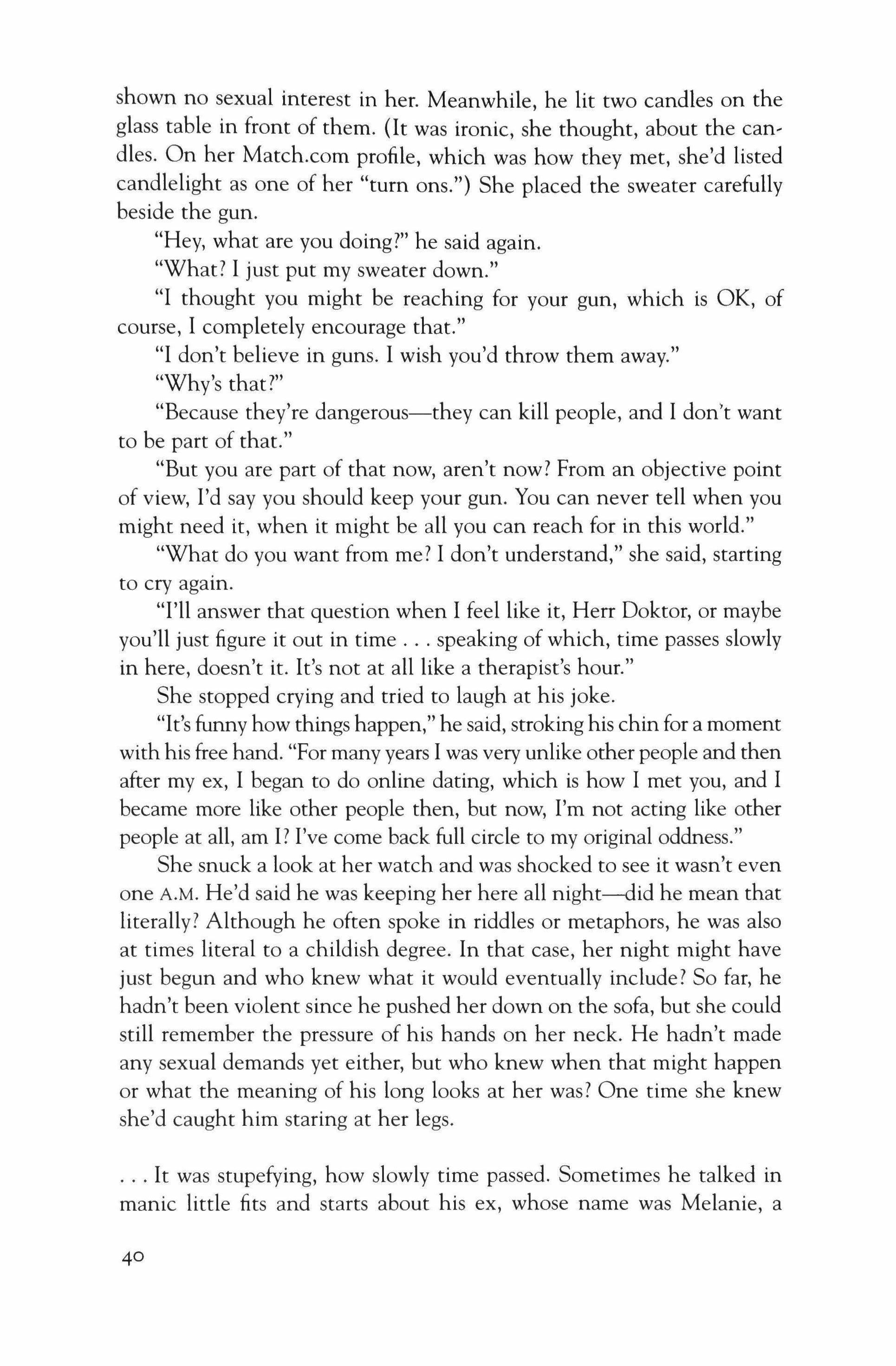
shown no sexual interest in her. Meanwhile, he lit two candles on the glass table in front of them. {It was ironic, she thought, about the candles. On her Match.com profile, which was how they met, she'd listed candlelight as one of her "turn ons.") She placed the sweater carefully beside the gun.
"Hey, what are you doing?" he said again.
"What? I just put my sweater down."
"I thought you might be reaching for your gun, which is OK, of course, I completely encourage that."
"I don't believe in guns. I wish you'd throw them away."
"Why's that?"
"Because they're dangerous-they can kill people, and I don't want to be part of that."
"But you are part of that now, aren't now? From an objective point of view, I'd say you should keep your gun. You can never tell when you might need it, when it might be all you can reach for in this world."
"What do you want from me? I don't understand," she said, starting to cry again.
"I'll answer that question when I feel like it, Herr Doktor, or maybe you'll just figure it out in time speaking of which, time passes slowly in here, doesn't it. It's not at all like a therapist's hour."
She stopped crying and tried to laugh at his joke.
"It's funny how things happen," he said, stroking his chin for a moment with his free hand. "For many years I was very unlike other people and then after my ex, I began to do online dating, which is how I met you, and I became more like other people then, but now, I'm not acting like other people at all, am I? I've come back full circle to my original oddness."
She snuck a look at her watch and was shocked to see it wasn't even one A.M. He'd said he was keeping her here all night-did he mean that literally? Although he often spoke in riddles or metaphors, he was also at times literal to a childish degree. In that case, her night might have just begun and who knew what it would eventually include? So far, he hadn't been violent since he pushed her down on the sofa, but she could still remember the pressure of his hands on her neck. He hadn't made any sexual demands yet either, but who knew when that might happen or what the meaning of his long looks at her was? One time she knew she'd caught him staring at her legs
It was stupefying, how slowly time passed. Sometimes he talked in manic little fits and starts about his ex, whose name was Melanie, a
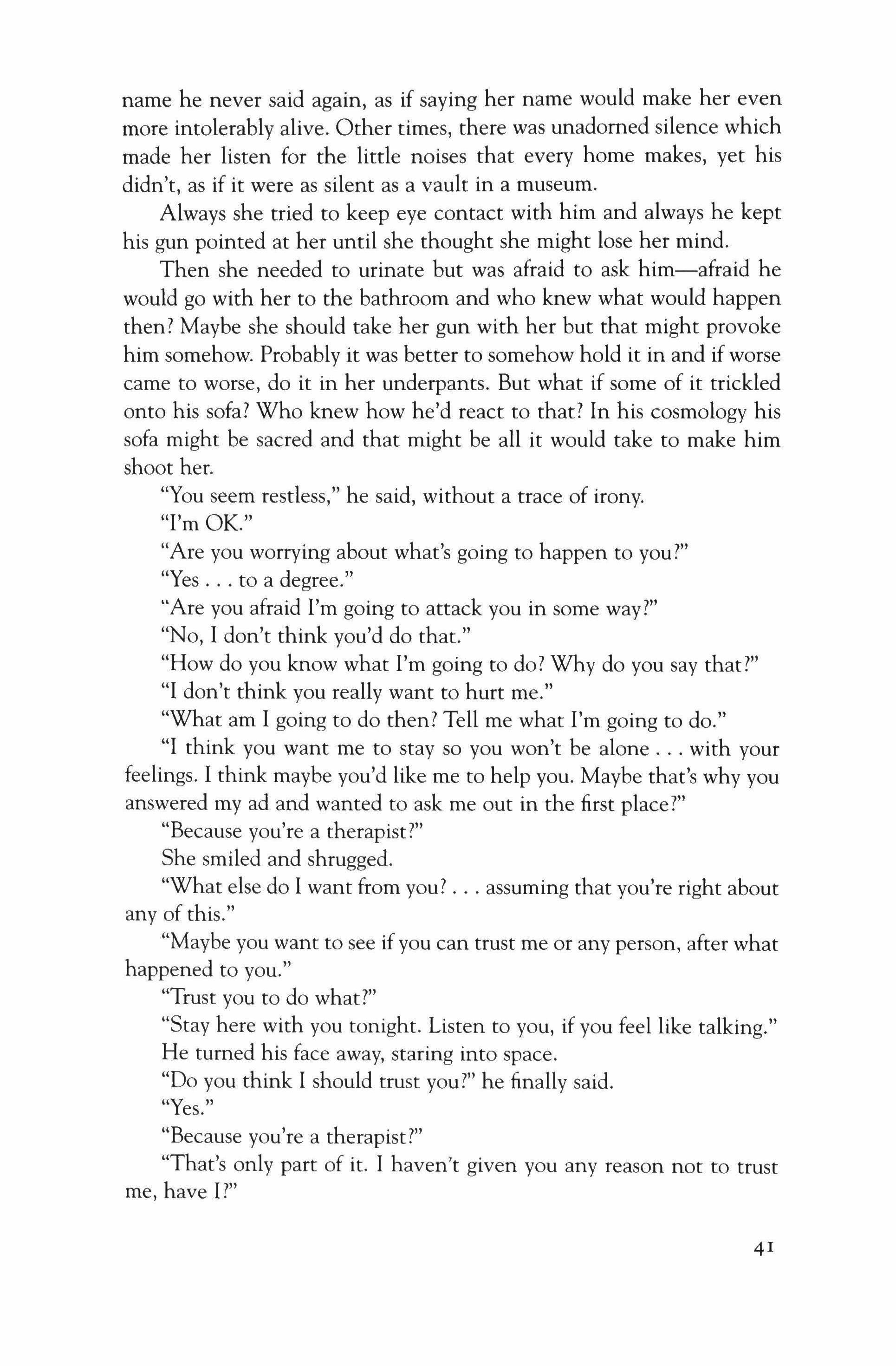
name he never said again, as if saying her name would make her even more intolerably alive. Other times, there was unadorned silence which made her listen for the little noises that every home makes, yet his didn't, as if it were as silent as a vault in a museum.
Always she tried to keep eye contact with him and always he kept his gun pointed at her until she thought she might lose her mind.
Then she needed to urinate but was afraid to ask him-afraid he would go with her to the bathroom and who knew what would happen then? Maybe she should take her gun with her but that might provoke him somehow. Probably it was better to somehow hold it in and if worse came to worse, do it in her underpants. But what if some of it trickled onto his sofa? Who knew how he'd react to that? In his cosmology his sofa might be sacred and that might be all it would take to make him shoot her.
"You seem restless," he said, without a trace of irony. "I'm OK."
"Are you worrying about what's going to happen to you?"
"Yes to a degree."
"Are you afraid I'm going to attack you in some way?"
"No, I don't think you'd do that."
"How do you know what I'm going to do? Why do you say that?"
"I don't think you really want to hurt me."
"What am I going to do then? Tell me what I'm going to do."
"I think you want me to stay so you won't be alone with your feelings. I think maybe you'd like me to help you. Maybe that's why you answered my ad and wanted to ask me out in the first place?"
"Because you're a therapist?"
She smiled and shrugged.
"What else do I want from you? assuming that you're right about any of this."
"Maybe you want to see if you can trust me or any person, after what happened to you."
"Trust you to do what?"
"Stay here with you tonight. Listen to you, if you feel like talking." He turned his face away, staring into space.
"Do you think I should trust you?" he finally said. "Yes."
"Because you're a therapist?"
"That's only part of it. I haven't given you any reason not to trust me, have I?"
41
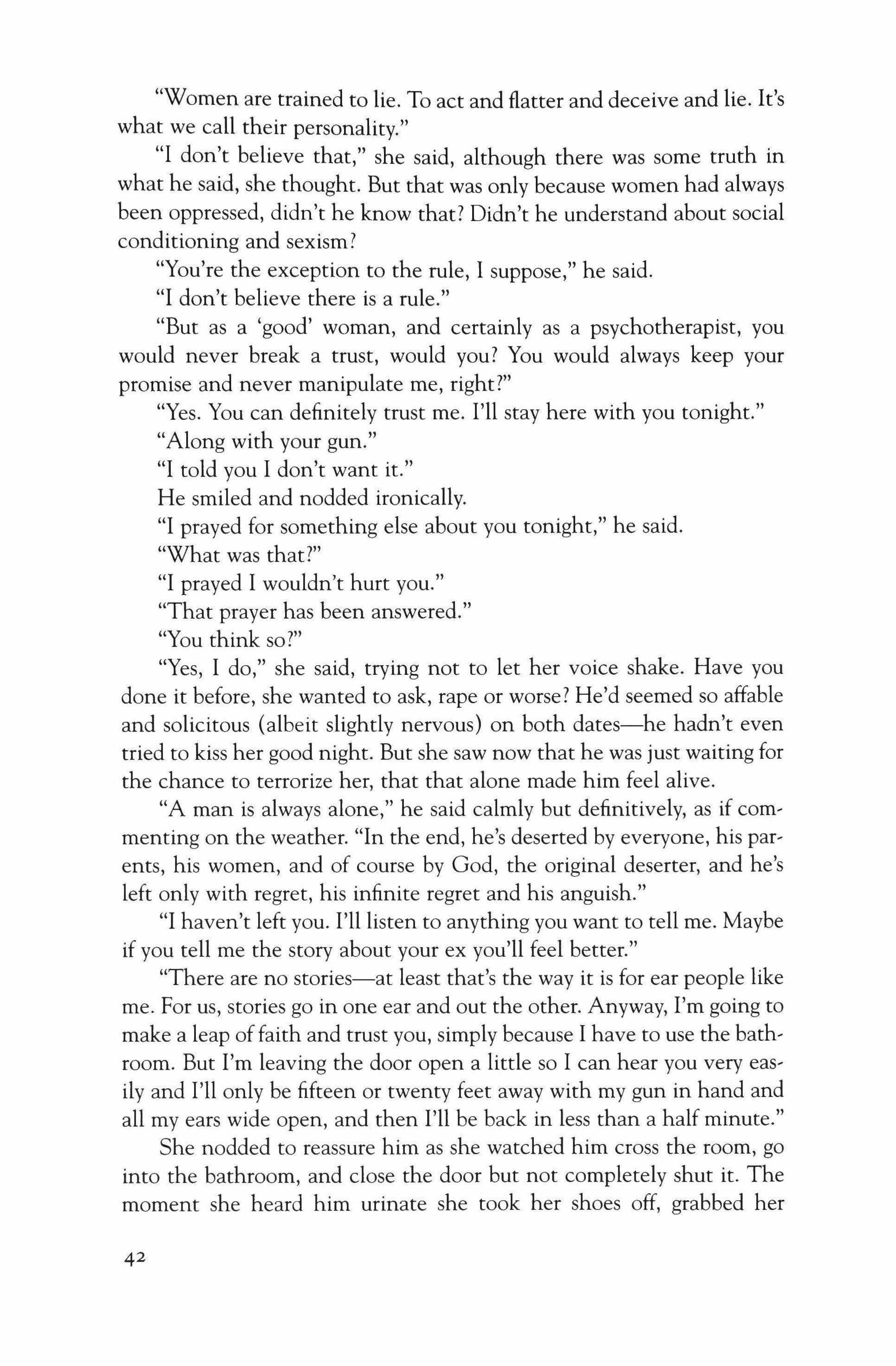
"Women are trained to lie. To act and flatter and deceive and lie. It's what we call their personality."
"I don't believe that," she said, although there was some truth in what he said, she thought. But that was only because women had always been oppressed, didn't he know that? Didn't he understand about social conditioning and sexism?
"You're the exception to the rule, I suppose," he said.
"I don't believe there is a rule."
"But as a 'good' woman, and certainly as a psychotherapist, you would never break a trust, would you? You would always keep your promise and never manipulate me, right?"
"Yes. You can definitely trust me. I'll stay here with you tonight."
"Along with your gun."
"I told you I don't want it."
He smiled and nodded ironically.
"I prayed for something else about you tonight," he said.
"What was that?"
"I prayed I wouldn't hurt you."
"That prayer has been answered."
"You think so?"
"Yes, I do," she said, trying not to let her voice shake. Have you done it before, she wanted to ask, rape or worse? He'd seemed so affable and solicitous {albeit slightly nervous} on both dates-he hadn't even tried to kiss her good night. But she saw now that he was just waiting for the chance to terrorize her, that that alone made him feel alive.
"A man is always alone," he said calmly but definitively, as if commenting on the weather. "In the end, he's deserted by everyone, his parents, his women, and of course by God, the original deserter, and he's left only with regret, his infinite regret and his anguish."
"I haven't left you. I'll listen to anything you want to tell me. Maybe if you tell me the story about your ex you'll feel better."
"There are no stories-at least that's the way it is for ear people like me. For us, stories go in one ear and out the other. Anyway, I'm going to make a leap offaith and trust you, simply because I have to use the bathroom. But I'm leaving the door open a little so I can hear you very easily and I'll only be fifteen or twenty feet away with my gun in hand and all my ears wide open, and then I'll be back in less than a half minute."
She nodded to reassure him as she watched him cross the room, go into the bathroom, and close the door but not completely shut it. The moment she heard him urinate she took her shoes off, grabbed her
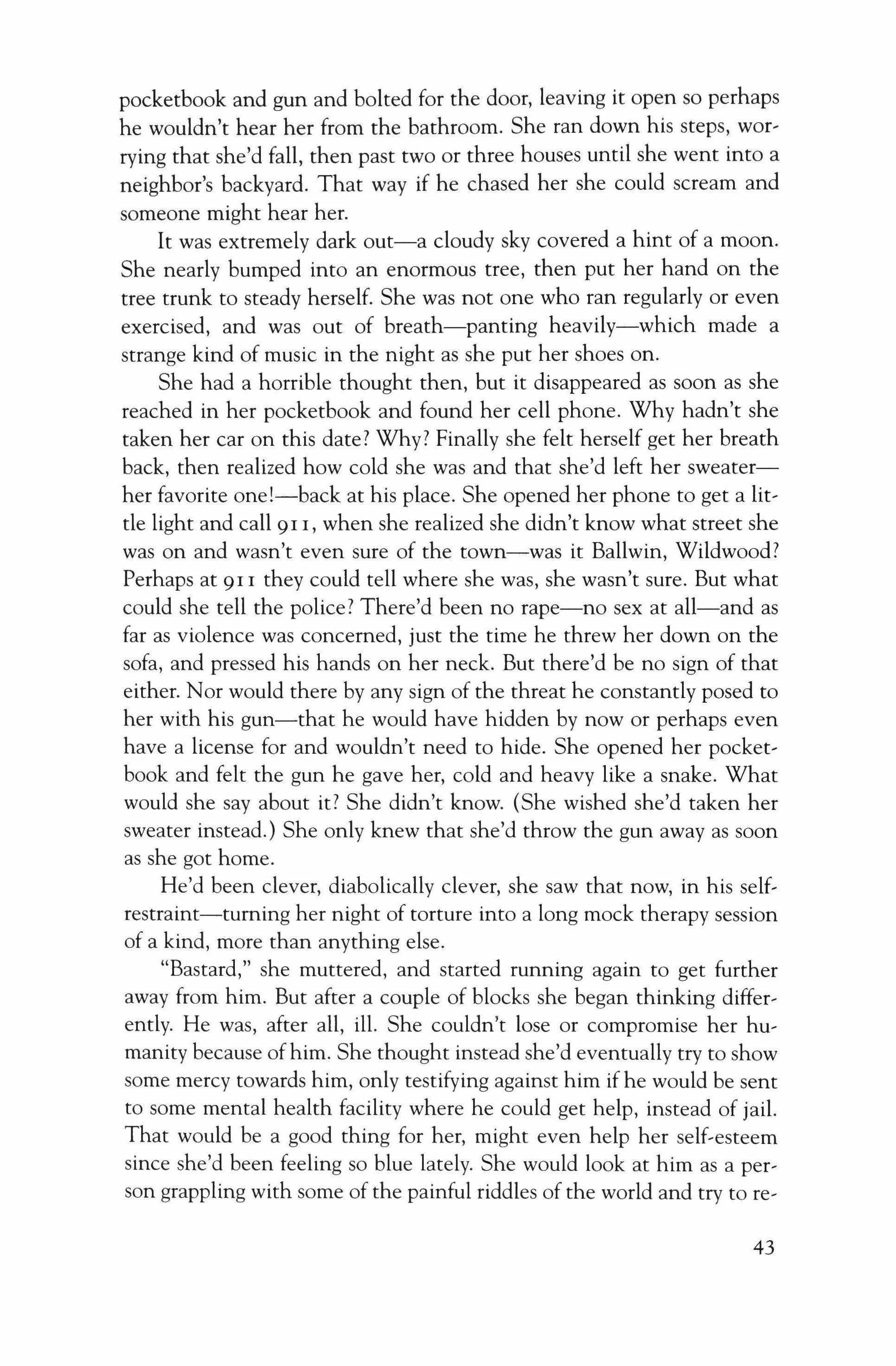
pocketbook and gun and bolted for the door, leaving it open so perhaps he wouldn't hear her from the bathroom. She ran down his steps, worrying that she'd fall, then past two or three houses until she went into a neighbor's backyard. That way if he chased her she could scream and someone might hear her.
It was extremely dark out-a cloudy sky covered a hint of a moon. She nearly bumped into an enormous tree, then put her hand on the tree trunk to steady herself. She was not one who ran regularly or even exercised, and was out of breath-panting heavily-which made a strange kind of music in the night as she put her shoes on.
She had a horrible thought then, but it disappeared as soon as she reached in her pocketbook and found her cell phone. Why hadn't she taken her car on this date? Why? Finally she felt herself get her breath back, then realized how cold she was and that she'd left her sweaterher favorite one!-back at his place. She opened her phone to get a Itttle light and call 91 I, when she realized she didn't know what street she was on and wasn't even sure of the town-was it Ballwin, Wildwood? Perhaps at 9 I I they could tell where she was, she wasn't sure. But what could she tell the police? There'd been no rape-no sex at all-and as far as violence was concerned, just the time he threw her down on the sofa, and pressed his hands on her neck. But there'd be no sign of that either. Nor would there by any sign of the threat he constantly posed to her with his gun-that he would have hidden by now or perhaps even have a license for and wouldn't need to hide. She opened her pocketbook and felt the gun he gave her, cold and heavy like a snake. What would she say about it? She didn't know. (She wished she'd taken her sweater instead.) She only knew that she'd throw the gun away as soon as she got home.
He'd been clever, diabolically clever, she saw that now, in his selfrestraint-turning her night of torture into a long mock therapy session of a kind, more than anything else.
"Bastard," she muttered, and started running again to get further away from him. But after a couple of blocks she began thinking differently. He was, after all, ill. She couldn't lose or compromise her humanity because of him. She thought instead she'd eventually try to show some mercy towards him, only testifying against him ifhe would be sent to some mental health facility where he could get help, instead of jail. That would be a good thing for her, might even help her self-esteem since she'd been feeling so blue lately. She would look at him as a person grappling with some of the painful riddles of the world and try to re-
43
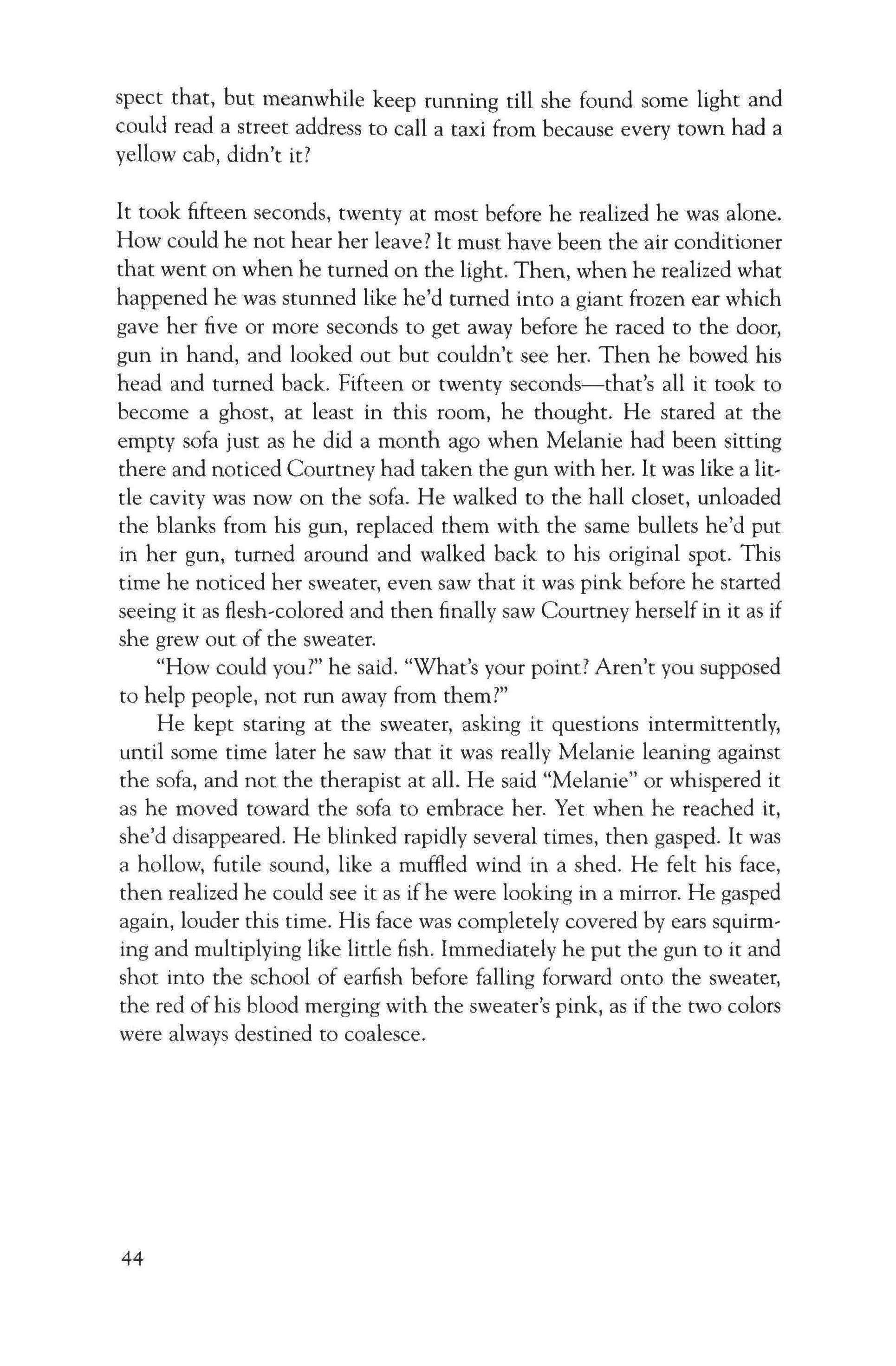
spect that, but meanwhile keep running till she found some light and could read a street address to call a taxi from because every town had a yellow cab, didn't it?
It took fifteen seconds, twenty at most before he realized he was alone. How could he not hear her leave? It must have been the air conditioner that went on when he turned on the light. Then, when he realized what happened he was stunned like he'd turned into a giant frozen ear which gave her five or more seconds to get away before he raced to the door, gun in hand, and looked out but couldn't see her. Then he bowed his head and turned back. Fifteen or twenty seconds-that's all it took to become a ghost, at least in this room, he thought. He stared at the empty sofa just as he did a month ago when Melanie had been sitting there and noticed Courtney had taken the gun with her. It was like a little cavity was now on the sofa. He walked to the hall closet, unloaded the blanks from his gun, replaced them with the same bullets he'd put in her gun, turned around and walked back to his original spot. This time he noticed her sweater, even saw that it was pink before he started seeing it as flesh-colored and then finally saw Courtney herself in it as if she grew out of the sweater.
"How could you?" he said. "What's your point? Aren't you supposed to help people, not run away from them?"
He kept staring at the sweater, asking it questions intermittently, until some time later he saw that it was really Melanie leaning against the sofa, and not the therapist at all. He said "Melanie" or whispered it as he moved toward the sofa to embrace her. Yet when he reached it, she'd disappeared. He blinked rapidly several times, then gasped. It was a hollow, futile sound, like a muffled wind in a shed. He felt his face, then realized he could see it as if he were looking in a mirror. He gasped again, louder this time. His face was completely covered by ears squirming and multiplying like little fish. Immediately he put the gun to it and shot into the school of earfish before falling forward onto the sweater, the red of his blood merging with the sweater's pink, as if the two colors were always destined to coalesce.
44
Midge Raymond
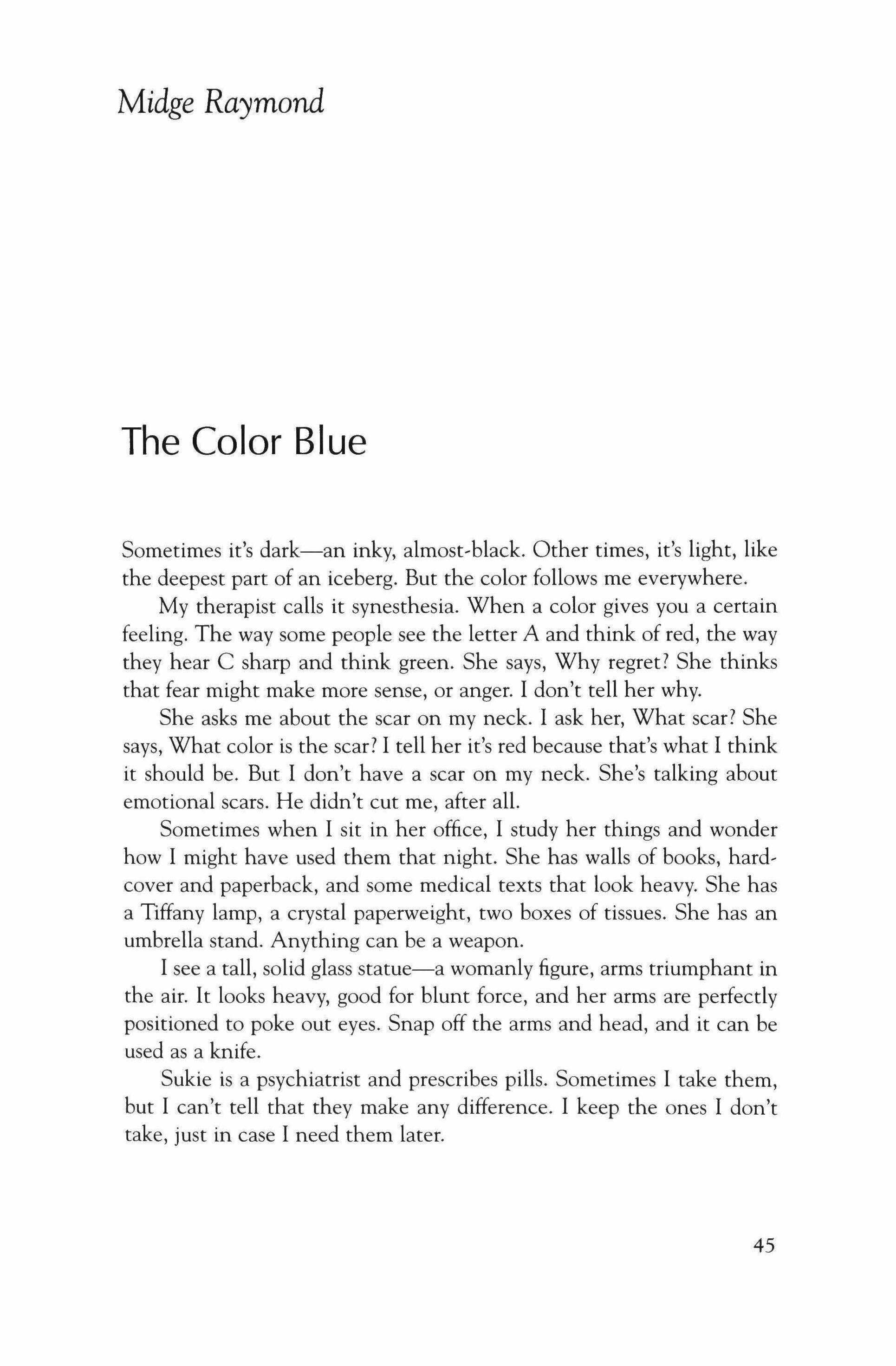
The Color Blue
Sometimes it's dark-an inky, almost,black. Other times, it's light, like the deepest part of an iceberg. But the color follows me everywhere.
My therapist calls it synesthesia. When a color gives you a certain feeling. The way some people see the letter A and think of red, the way they hear C sharp and think green. She says, Why regret? She thinks that fear might make more sense, or anger. I don't tell her why.
She asks me about the scar on my neck. I ask her, What scar? She says, What color is the scar? I tell her it's red because that's what I think it should be. But I don't have a scar on my neck. She's talking about emotional scars. He didn't cut me, after all.
Sometimes when I sit in her office, I study her things and wonder how I might have used them that night. She has walls of books, hard, cover and paperback, and some medical texts that look heavy. She has a Tiffany lamp, a crystal paperweight, two boxes of tissues. She has an umbrella stand. Anything can be a weapon.
I see a tall, solid glass statue-a womanly figure, arms triumphant in the air. It looks heavy, good for blunt force, and her arms are perfectly positioned to poke out eyes. Snap off the arms and head, and it can be used as a knife.
Sukie is a psychiatrist and prescribes pills. Sometimes I take them, but I can't tell that they make any difference. I keep the ones I don't take, just in case I need them later.
45
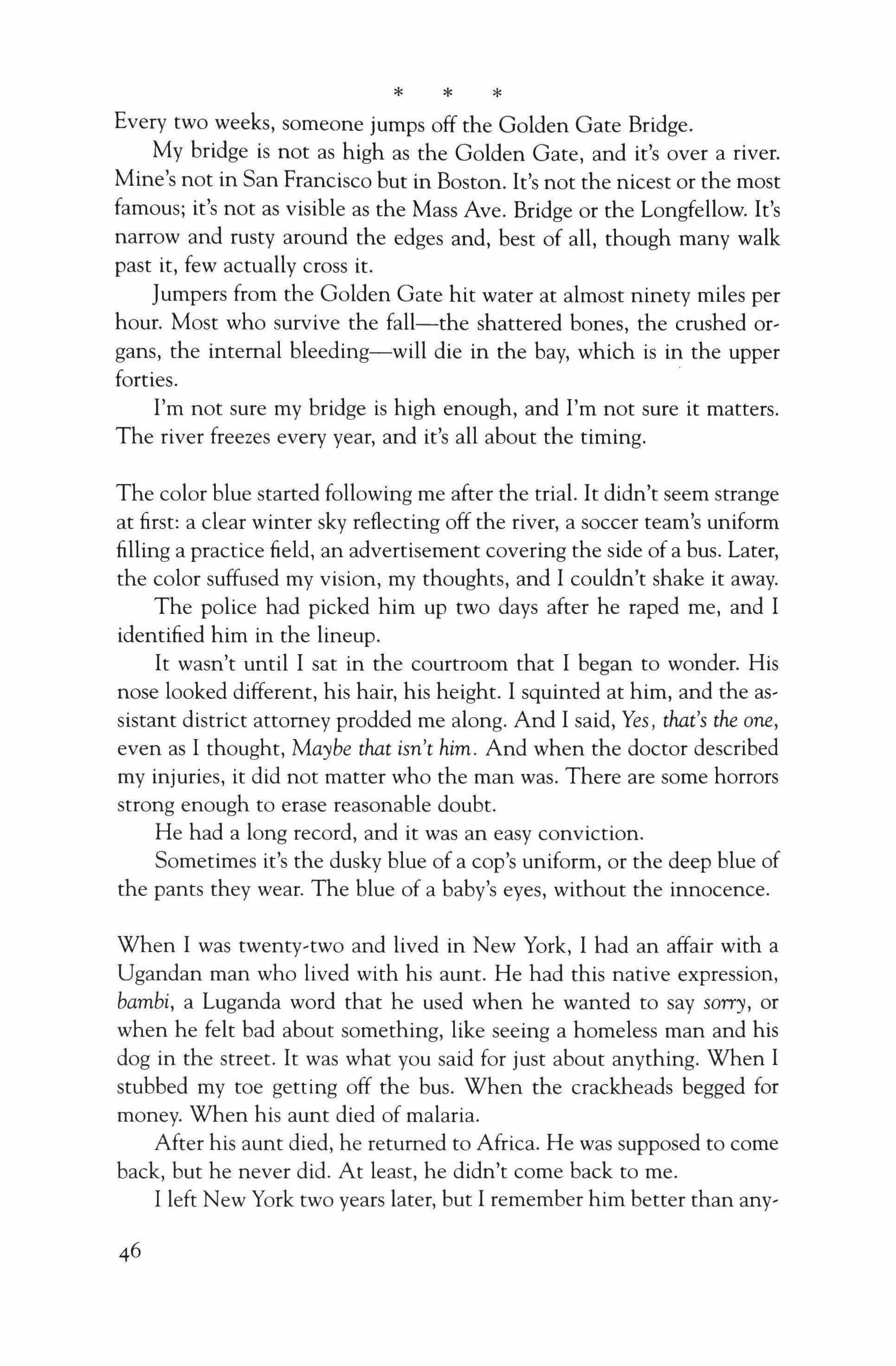
* * *
Every two weeks, someone jumps off the Golden Gate Bridge.
My bridge is not as high as the Golden Gate, and it's over a river. Mine's not in San Francisco but in Boston. It's not the nicest or the most famous; it's not as visible as the Mass Ave. Bridge or the Longfellow. It's narrow and rusty around the edges and, best of all, though many walk past it, few actually cross it.
Jumpers from the Golden Gate hit water at almost ninety miles per hour. Most who survive the fall-the shattered bones, the crushed organs, the internal bleeding-will die in the bay, which is in the upper forties.
I'm not sure my bridge is high enough, and I'm not sure it matters. The river freezes every year, and it's all about the timing.
The color blue started following me after the trial. It didn't seem strange at first: a clear winter sky reflecting off the river, a soccer team's uniform filling a practice field, an advertisement covering the side of a bus. Later, the color suffused my vision, my thoughts, and I couldn't shake it away.
The police had picked him up two days after he raped me, and I identified him in the lineup.
It wasn't until I sat in the courtroom that I began to wonder. His nose looked different, his hair, his height. I squinted at him, and the assistant district attorney prodded me along. And I said, Yes, that's the one, even as I thought, Maybe that isn't him. And when the doctor described my injuries, it did not matter who the man was. There are some horrors strong enough to erase reasonable doubt.
He had a long record, and it was an easy conviction.
Sometimes it's the dusky blue of a cop's uniform, or the deep blue of the pants they wear. The blue of a baby's eyes, without the innocence.
When I was twenty-two and lived in New York, I had an affair with a Ugandan man who lived with his aunt. He had this native expression, bambi, a Luganda word that he used when he wanted to say sorry, or when he felt bad about something, like seeing a homeless man and his dog in the street. It was what you said for just about anything. When I stubbed my toe getting off the bus. When the crackheads begged for money. When his aunt died of malaria.
After his aunt died, he returned to Africa. He was supposed to come back, but he never did. At least, he didn't come back to me.
I left New York two years later, but I remember him better than any-
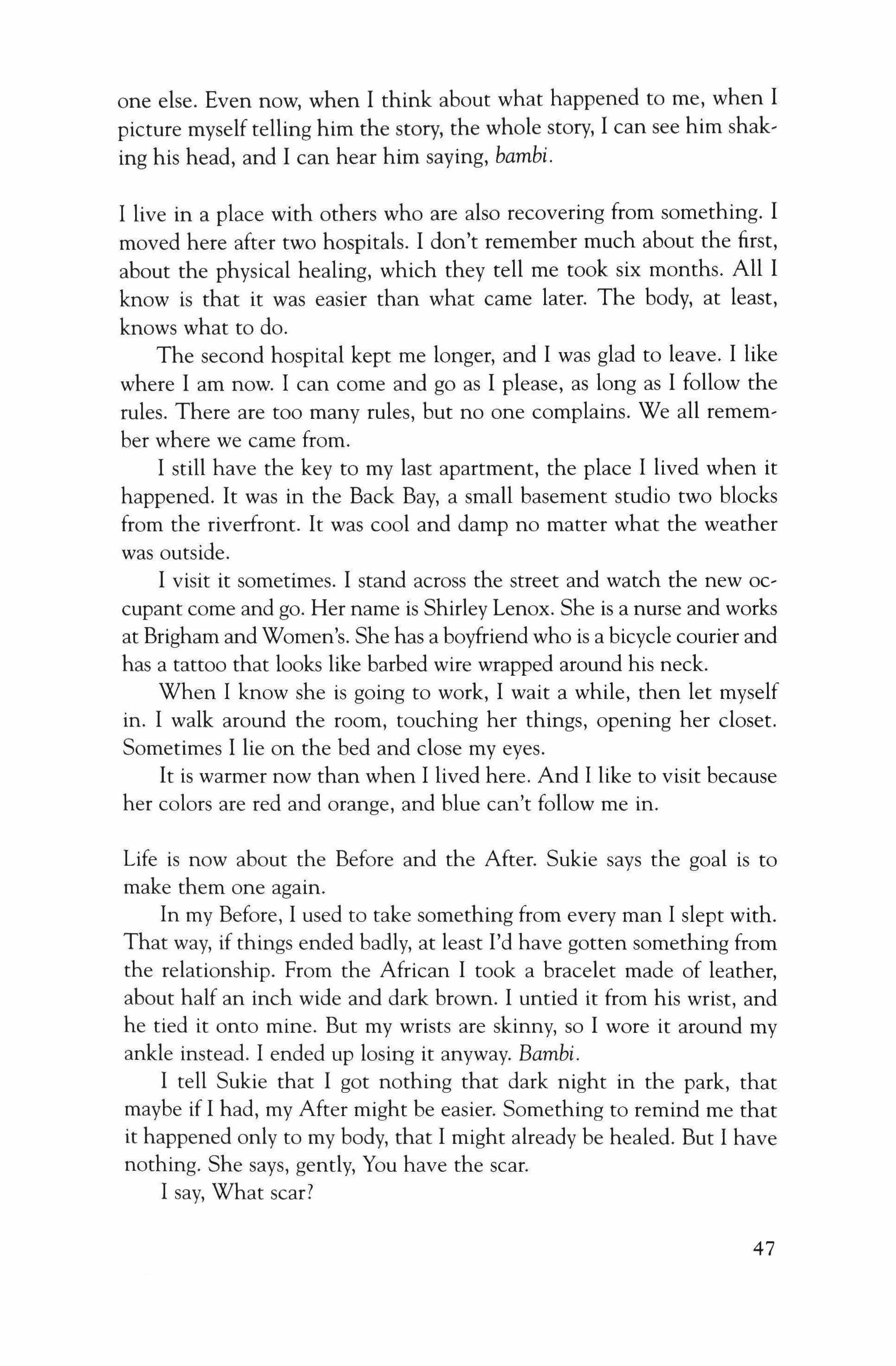
one else. Even now, when I think about what happened to me, when I picture myself telling him the story, the whole story, I can see him shaking his head, and I can hear him saying, bambi.
I live in a place with others who are also recovering from something. I moved here after two hospitals. I don't remember much about the first, about the physical healing, which they tell me took six months. All I know is that it was easier than what came later. The body, at least, knows what to do.
The second hospital kept me longer, and I was glad to leave. I like where I am now. I can come and go as I please, as long as I follow the rules. There are too many rules, but no one complains. We all remember where we came from.
I still have the key to my last apartment, the place I lived when it happened. It was in the Back Bay, a small basement studio two blocks from the riverfront. It was cool and damp no matter what the weather was outside.
I visit it sometimes. I stand across the street and watch the new occupant come and go. Her name is Shirley Lenox. She is a nurse and works at Brigham and Women's. She has a boyfriend who is a bicycle courier and has a tattoo that looks like barbed wire wrapped around his neck.
When I know she is going to work, I wait a while, then let myself in. I walk around the room, touching her things, opening her closet. Sometimes I lie on the bed and close my eyes.
It is warmer now than when I lived here. And I like to visit because her colors are red and orange, and blue can't follow me in.
Life is now about the Before and the After. Sukie says the goal is to make them one again.
In my Before, I used to take something from every man I slept with. That way, if things ended badly, at least I'd have gotten something from the relationship. From the African I took a bracelet made of leather, about half an inch wide and dark brown. I untied it from his wrist, and he tied it onto mine. But my wrists are skinny, so I wore it around my ankle instead. I ended up losing it anyway. Bambi.
I tell Sukie that I got nothing that dark night in the park, that maybe if I had, my After might be easier. Something to remind me that it happened only to my body, that I might already be healed. But I have nothing. She says, gently, You have the scar.
I say, What scar?
47
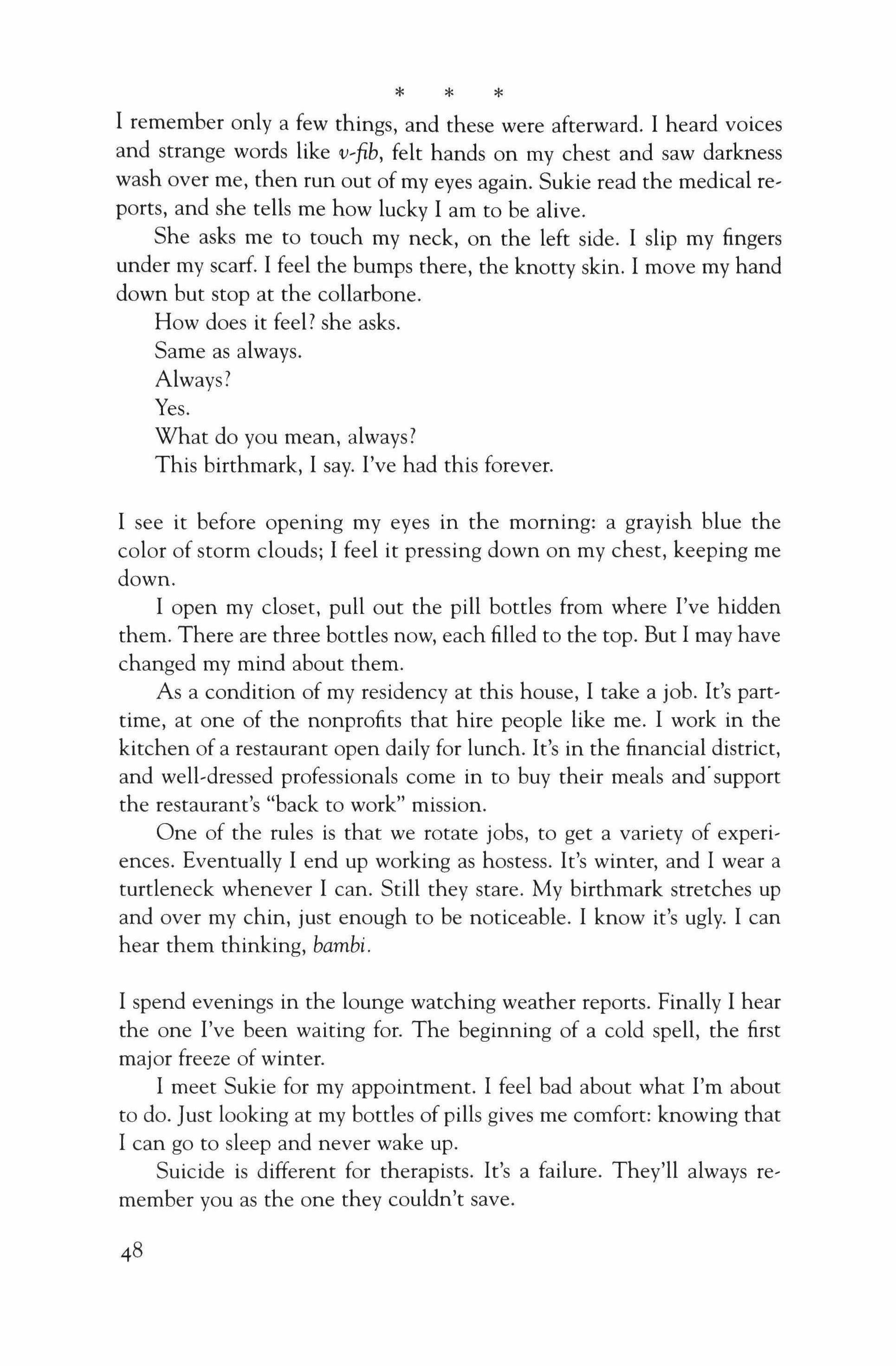
I remember only a few things, and these were afterward. I heard voices and strange words like v,fib, felt hands on my chest and saw darkness wash over me, then run out of my eyes again. Sukie read the medical reports, and she tells me how lucky I am to be alive.
She asks me to touch my neck, on the left side. I slip my fingers under my scarf. I feel the bumps there, the knotty skin. I move my hand down but stop at the collarbone.
How does it feel? she asks.
Same as always.
Always?
Yes.
What do you mean, always?
This birthmark, I say. I've had this forever.
I see it before opening my eyes in the morning: a grayish blue the color of storm clouds; I feel it pressing down on my chest, keeping me down.
I open my closet, pull out the pill bottles from where I've hidden them. There are three bottles now, each filled to the top. But I may have changed my mind about them.
As a condition of my residency at this house, I take a job. It's parttime, at one of the nonprofits that hire people like me. I work in the kitchen of a restaurant open daily for lunch. It's in the financial district, and well-dressed professionals come in to buy their meals and'support the restaurant's "back to work" mission.
One of the rules is that we rotate jobs, to get a variety of experiences. Eventually I end up working as hostess. It's winter, and I wear a turtleneck whenever I can. Still they stare. My birthmark stretches up and over my chin, just enough to be noticeable. I know it's ugly. I can hear them thinking, bambi.
I spend evenings in the lounge watching weather reports. Finally I hear the one I've been waiting for. The beginning of a cold spell, the first major freeze of winter.
I meet Sukie for my appointment. I feel bad about what I'm about to do. Just looking at my bottles of pills gives me comfort: knowing that I can go to sleep and never wake up.
Suicide is different for therapists. It's a failure. They'll always remember you as the one they couldn't save.
* * *
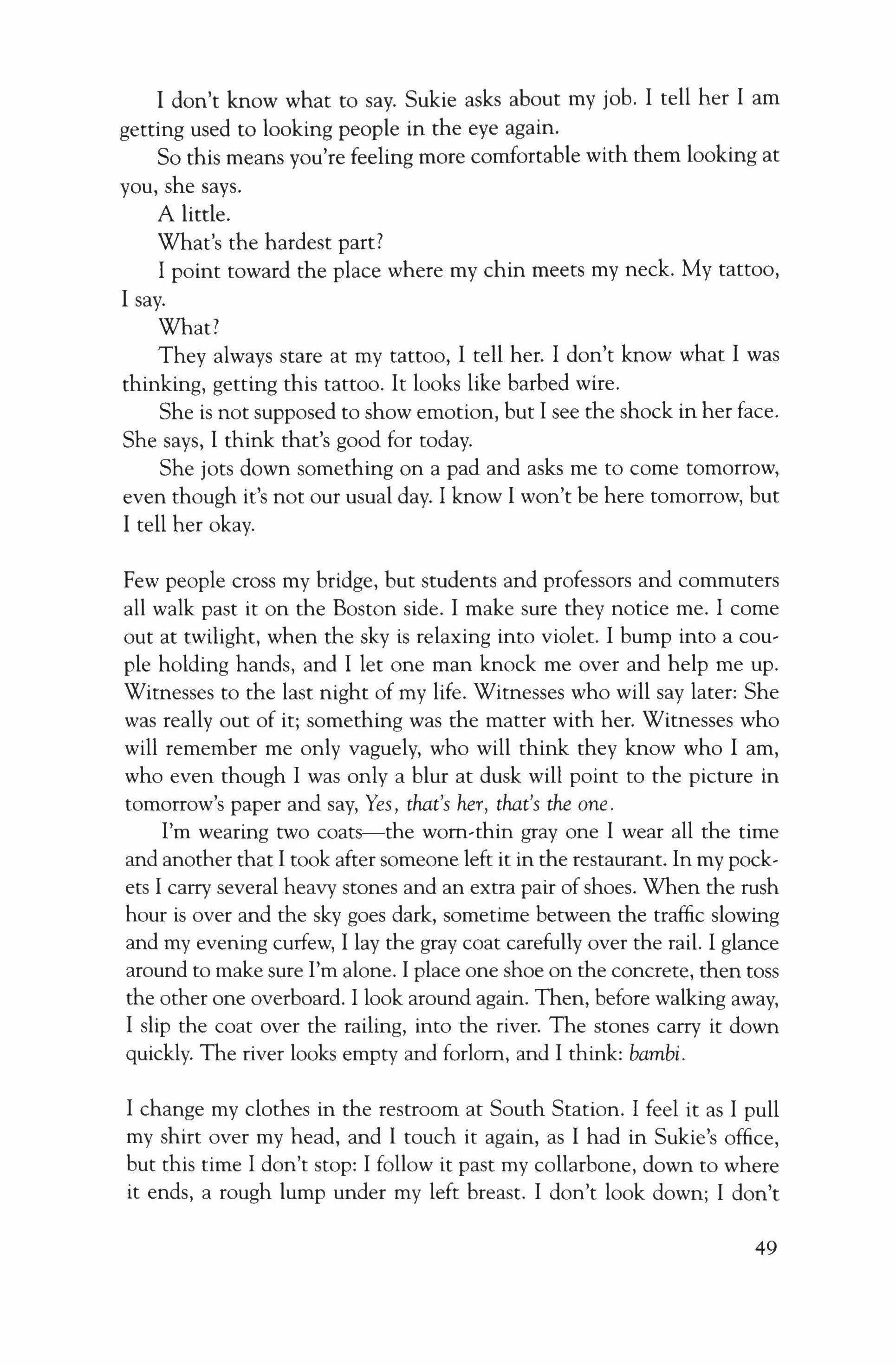
I don't know what to say. Sukie asks about my job. I tell her I am getting used to looking people in the eye again.
So this means you're feeling more comfortable with them looking at you, she says.
A little.
What's the hardest part?
I point toward the place where my chin meets my neck. My tattoo, I say.
What?
They always stare at my tattoo, I tell her. I don't know what I was thinking, getting this tattoo. It looks like barbed wire.
She is not supposed to show emotion, but I see the shock in her face. She says, I think that's good for today.
She jots down something on a pad and asks me to come tomorrow, even though it's not our usual day. I know I won't be here tomorrow, but I tell her okay.
Few people cross my bridge, but students and professors and commuters all walk past it on the Boston side. I make sure they notice me. I come out at twilight, when the sky is relaxing into violet. I bump into a couple holding hands, and I let one man knock me over and help me up. Witnesses to the last night of my life. Witnesses who will say later: She was really out of it; something was the matter with her. Witnesses who will remember me only vaguely, who will think they know who I am, who even though I was only a blur at dusk will point to the picture in tomorrow's paper and say, Yes, that's her, that's the one.
I'm wearing two coats-the worn-thin gray one I wear all the time and another that I took after someone left it in the restaurant. In my pock, ets I carry several heavy stones and an extra pair of shoes. When the rush hour is over and the sky goes dark, sometime between the traffic slowing and my evening curfew, I lay the gray coat carefully over the rail. I glance around to make sure I'm alone. I place one shoe on the concrete, then toss the other one overboard. I look around again. Then, before walking away, I slip the coat over the railing, into the river. The stones carry it down quickly. The river looks empty and forlorn, and I think: bambi.
I change my clothes in the restroom at South Station. I feel it as I pull my shirt over my head, and I touch it again, as I had in Sukie's office, but this time I don't stop: I follow it past my collarbone, down to where it ends, a rough lump under my left breast. I don't look down; I don't
49
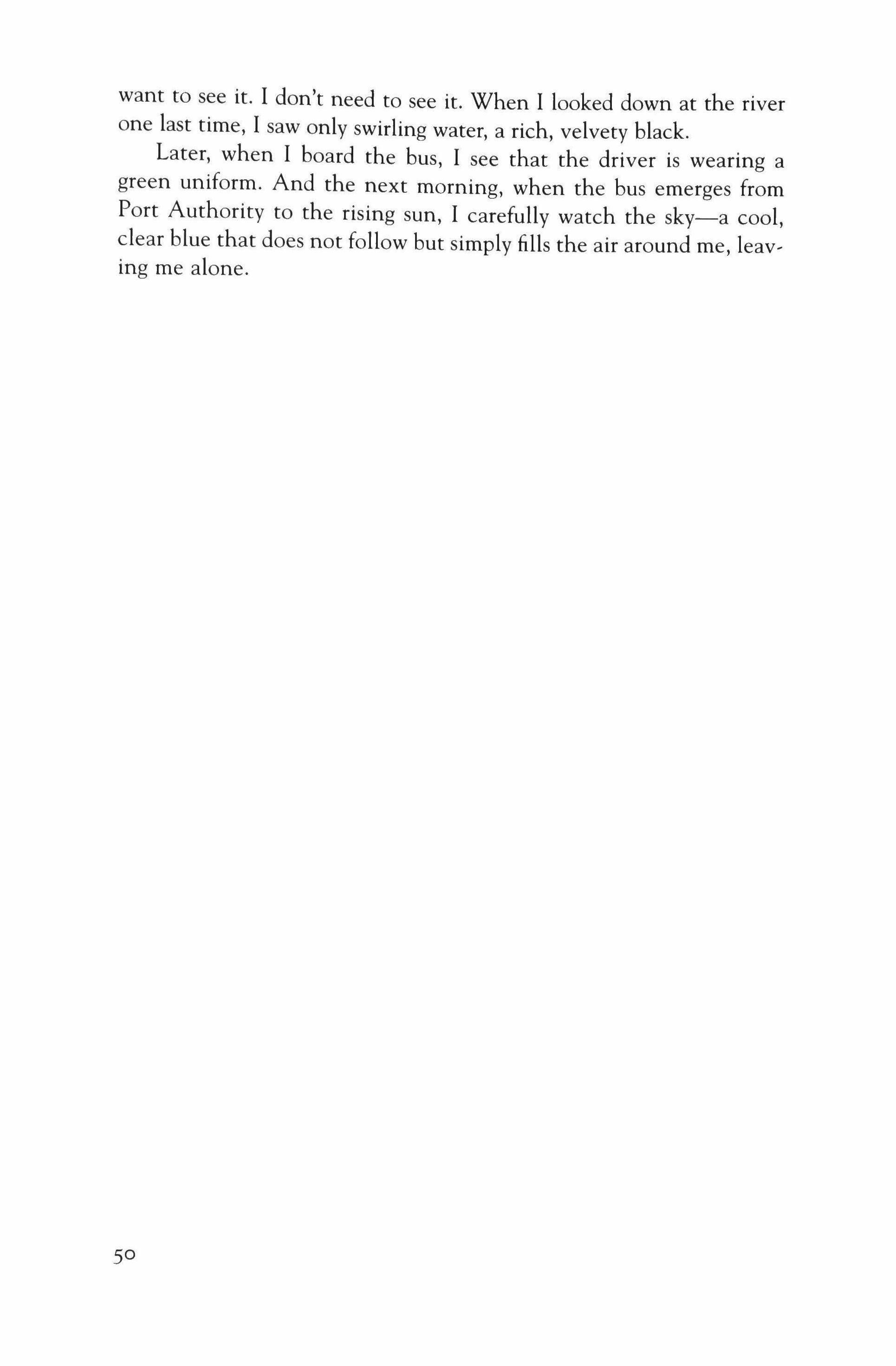
want to see it. I don't need to see it. When I looked down at the river one last time, I saw only swirling water, a rich, velvety black.
Later, when I board the bus, I see that the driver is wearing a green uniform. And the next morning, when the bus emerges from Port Authority to the rising sun, I carefully watch the sky-a cool, clear blue that does not follow but simply fills the air around me, leaving me alone.
50
John}. McCann
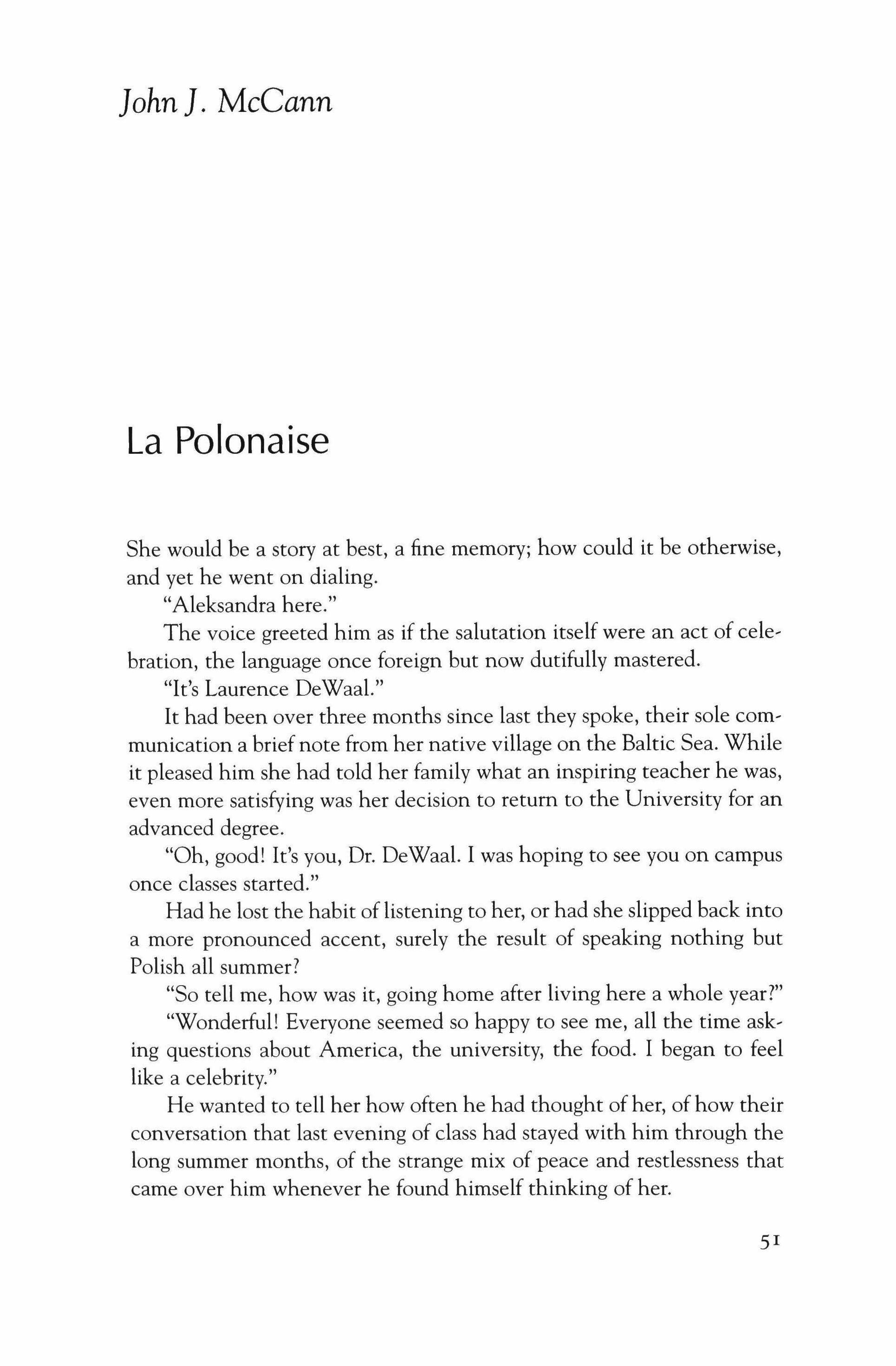
La Polonaise
She would be a story at best, a fine memory; how could it be otherwise, and yet he went on dialing.
"Aleksandra here."
The voice greeted him as if the salutation itself were an act of celebration, the language once foreign but now dutifully mastered.
"It's Laurence DeWaal."
It had been over three months since last they spoke, their sole communication a brief note from her native village on the Baltic Sea. While it pleased him she had told her family what an inspiring teacher he was, even more satisfying was her decision to return to the University for an advanced degree.
"Oh, good! It's you, Dr. DeWaal. I was hoping to see you on campus once classes started."
Had he lost the habit of listening to her, or had she slipped back into a more pronounced accent, surely the result of speaking nothing but Polish all summer?
"So tell me, how was it, going home after living here a whole year?"
"Wonderful! Everyone seemed so happy to see me, all the time asking questions about America, the university, the food. I began to feel like a celebrity."
He wanted to tell her how often he had thought of her, of how their conversation that last evening of class had stayed with him through the long summer months, of the strange mix of peace and restlessness that came over him whenever he found himself thinking of her.
51
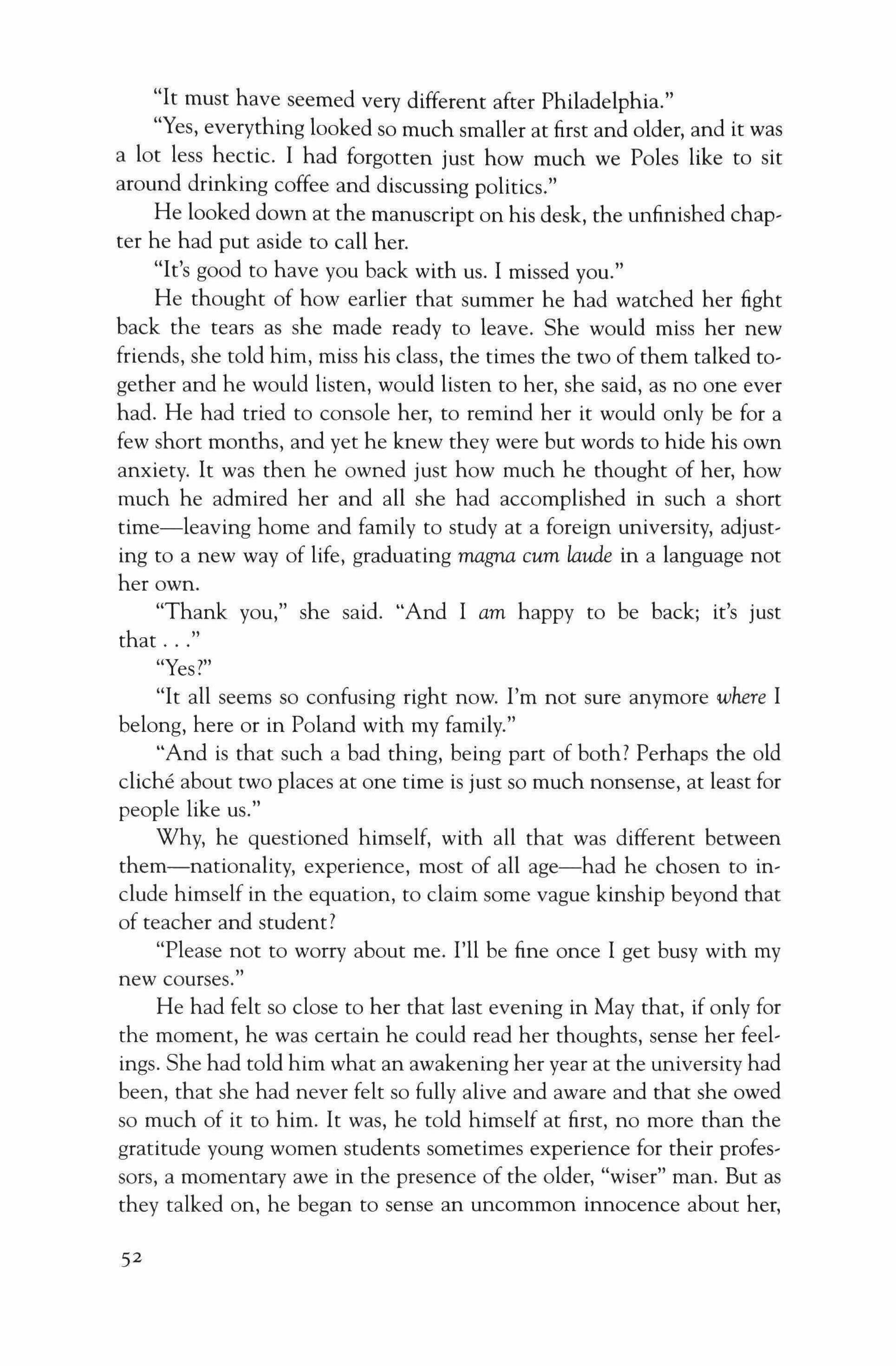
"It must have seemed very different after Philadelphia."
"Yes, everything looked so much smaller at first and older, and it was a lot less hectic. I had forgotten just how much we Poles like to sit around drinking coffee and discussing politics."
He looked down at the manuscript on his desk, the unfinished chapter he had put aside to call her.
"It's good to have you back with us. I missed you."
He thought of how earlier that summer he had watched her fight back the tears as she made ready to leave. She would miss her new friends, she told him, miss his class, the times the two of them talked together and he would listen, would listen to her, she said, as no one ever had. He had tried to console her, to remind her it would only be for a few short months, and yet he knew they were but words to hide his own anxiety. It was then he owned just how much he thought of her, how much he admired her and all she had accomplished in such a short time-leaving home and family to study at a foreign university, adjusting to a new way of life, graduating magna cum laude in a language not her own.
"Thank you," she said. "And I am happy to be back; it's just that "Yes?"
"It all seems so confusing right now. I'm not sure anymore where I belong, here or in Poland with my family."
"And is that such a bad thing, being part of both? Perhaps the old cliche about two places at one time is just so much nonsense, at least for people like us."
Why, he questioned himself, with all that was different between them-nationality, experience, most of all age-had he chosen to include himself in the equation, to claim some vague kinship beyond that of teacher and student?
"Please not to worry about me. I'll be fine once I get busy with my new courses."
He had felt so close to her that last evening in May that, if only for the moment, he was certain he could read her thoughts, sense her feelings. She had told him what an awakening her year at the university had been, that she had never felt so fully alive and aware and that she owed so much of it to him. It was, he told himself at first, no more than the gratitude young women students sometimes experience for their professors, a momentary awe in the presence of the older, "wiser" man. But as they talked on, he began to sense an uncommon innocence about her,
52
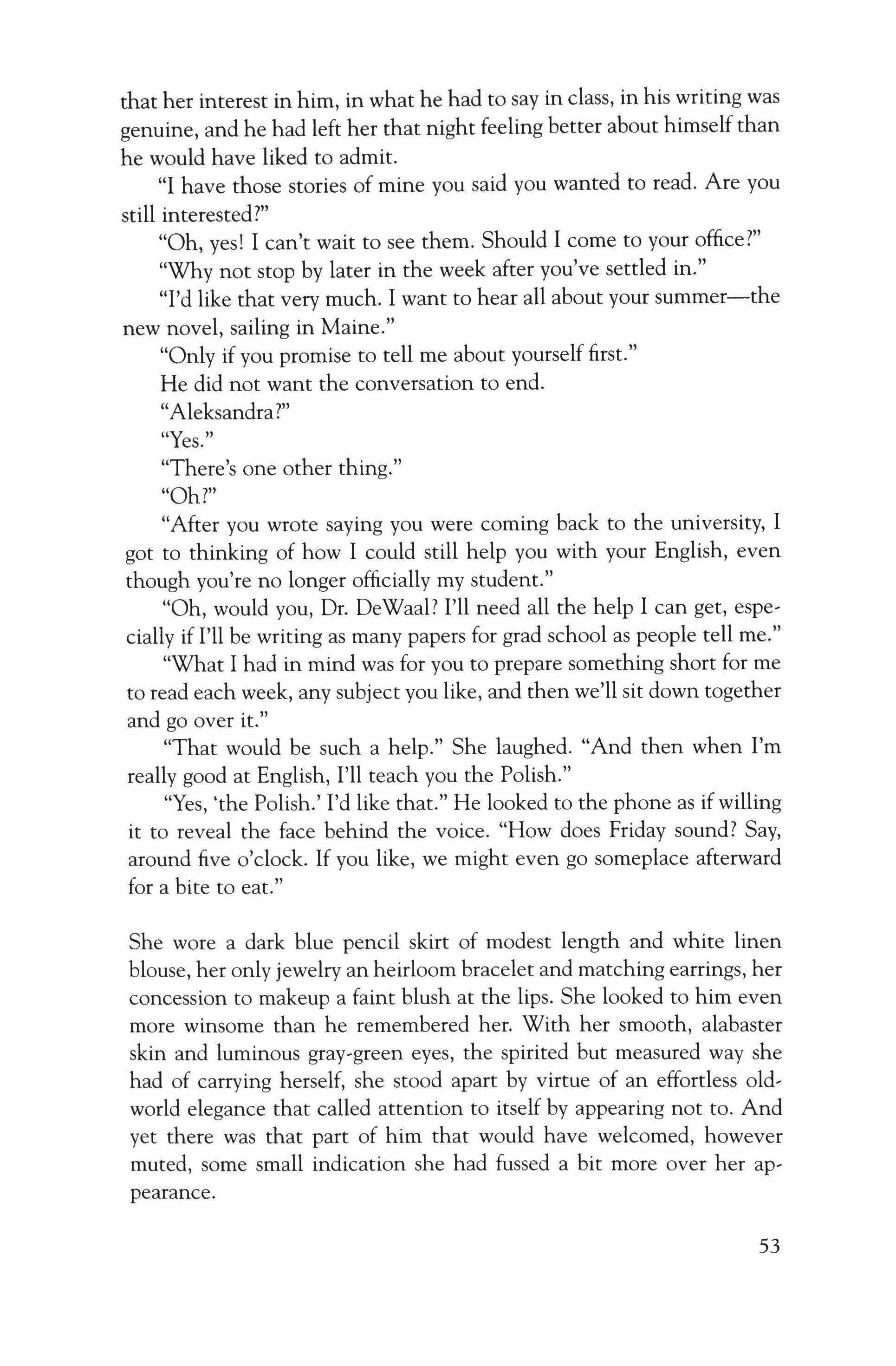
that her interest in him, in what he had to say in class, in his writing was genuine, and he had left her that night feeling better about himself than he would have liked to admit.
"I have those stories of mine you said you wanted to read. Are you still interested?"
"Oh, yes! 1 can't wait to see them. Should I come to your office?"
"Why not stop by later in the week after you've settled in."
"I'd like that very much. 1 want to hear all about your summer-the new novel, sailing in Maine."
"Only if you promise to tell me about yourself first."
He did not want the conversation to end.
"Aleksandra?"
"Yes."
"There's one other thing."
"Oh?"
"After you wrote saying you were coming back to the university, I got to thinking of how 1 could still help you with your English, even though you're no longer officially my student."
"Oh, would you, Dr. DeWaal? I'll need all the help 1 can get, especially if I'll be writing as many papers for grad school as people tell me."
"What I had in mind was for you to prepare something short for me to read each week, any subject you like, and then we'll sit down together and go over it."
"That would be such a help." She laughed. "And then when I'm really good at English, I'll teach you the Polish."
"Yes, 'the Polish.' I'd like that." He looked to the phone as if willing it to reveal the face behind the voice. "How does Friday sound? Say, around five o'clock. If you like, we might even go someplace afterward for a bite to eat."
She wore a dark blue pencil skirt of modest length and white linen blouse, her only jewelry an heirloom bracelet and matching earrings, her concession to makeup a faint blush at the lips. She looked to him even more winsome than he remembered her. With her smooth, alabaster skin and luminous gray-green eyes, the spirited but measured way she had of carrying herself, she stood apart by virtue of an effortless oldworld elegance that called attention to itself by appearing not to. And yet there was that part of him that would have welcomed, however muted, some small indication she had fussed a bit more over her appearance.
53
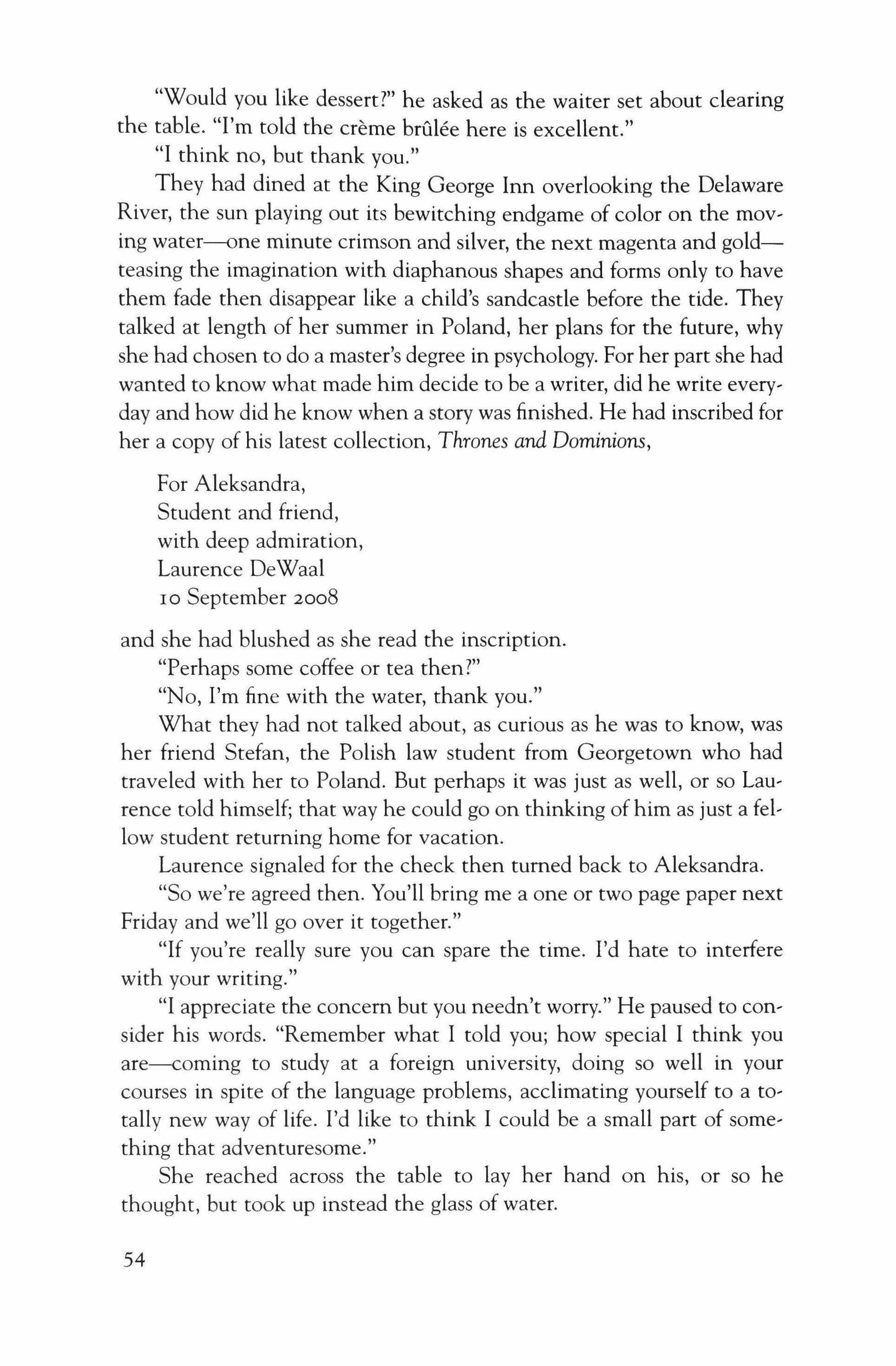
"Would you like dessert?" he asked as the waiter set about clearing the table. "I'm told the creme brulee here is excellent."
"I think no, but thank you."
They had dined at the King George Inn overlooking the Delaware River, the sun playing out its bewitching endgame of color on the moving water-s-one minute crimson and silver, the next magenta and goldteasing the imagination with diaphanous shapes and forms only to have them fade then disappear like a child's sandcastle before the tide. They talked at length of her summer in Poland, her plans for the future, why she had chosen to do a master's degree in psychology. For her part she had wanted to know what made him decide to be a writer, did he write every' day and how did he know when a story was finished. He had inscribed for her a copy of his latest collection, Thrones and Dominions,
For Aleksandra, Student and friend, with deep admiration, Laurence DeWaal 10 September 2008 and she had blushed as she read the inscription.
"Perhaps some coffee or tea then?"
"No, I'm fine with the water, thank you."
What they had not talked about, as curious as he was to know, was her friend Stefan, the Polish law student from Georgetown who had traveled with her to Poland. But perhaps it was just as well, or so Laurence told himself; that way he could go on thinking of him as just a fellow student returning home for vacation.
Laurence signaled for the check then turned back to Aleksandra.
"So we're agreed then. You'll bring me a one or two page paper next Friday and we'll go over it together."
"If you're really sure you can spare the time. I'd hate to interfere with your writing."
"I appreciate the concern but you needn't worry." He paused to con' sider his words. "Remember what I told you; how special I think you are-coming to study at a foreign university, doing so well in your courses in spite of the language problems, acclimating yourself to a to' tally new way of life. I'd like to think I could be a small part of some' thing that adventuresome."
She reached across the table to lay her hand on his, or so he thought, but took up instead the glass of water.
54
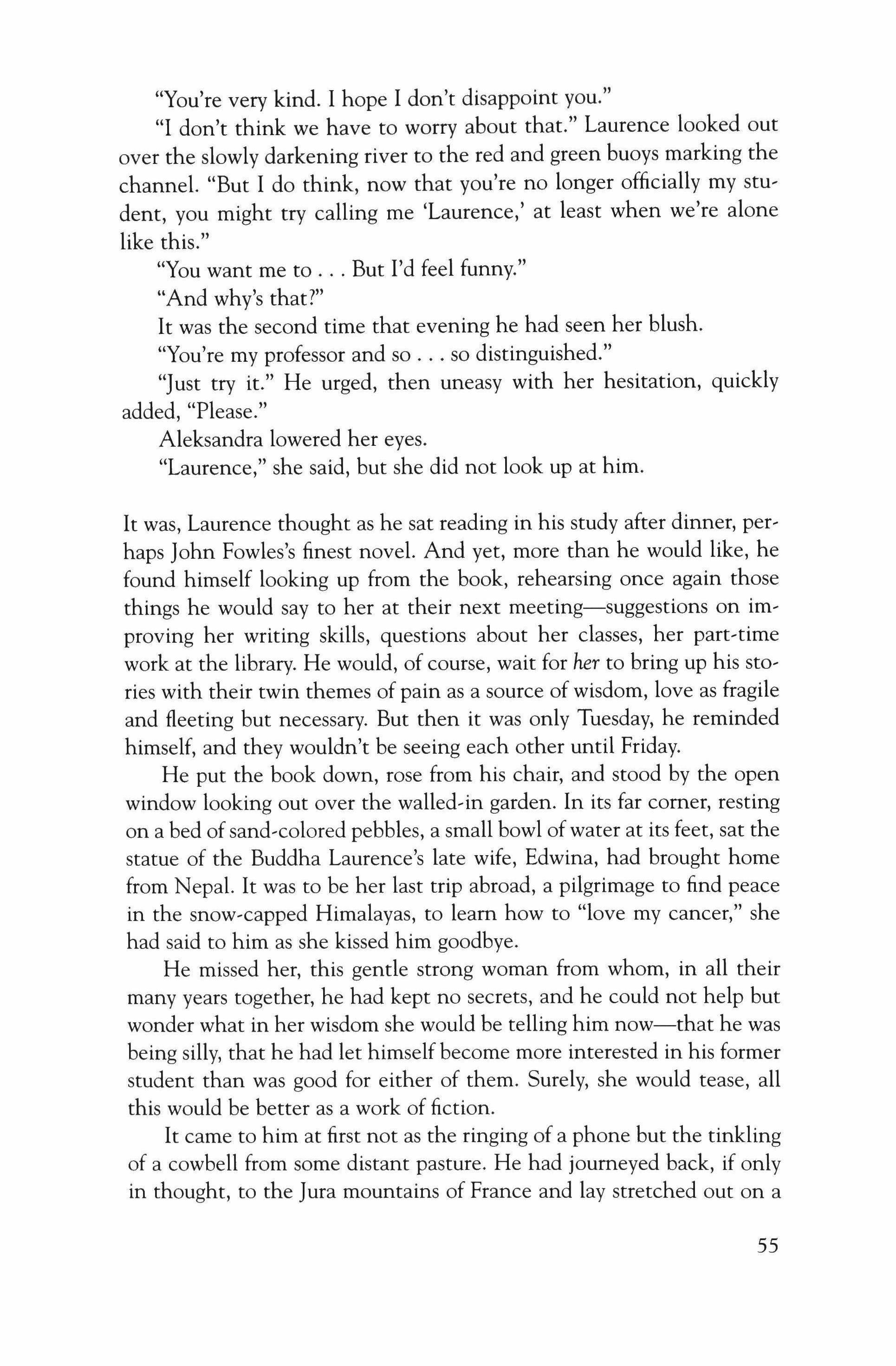
"You're very kind. I hope I don't disappoint you."
"I don't think we have to worry about that." Laurence looked out over the slowly darkening river to the red and green buoys marking the channel. "But I do think, now that you're no longer officially my stu, dent, you might try calling me 'Laurence,' at least when we're alone like this."
"You want me to But I'd feel funny."
"And why's that?"
It was the second time that evening he had seen her blush.
"You're my professor and so so distinguished."
"Just try it." He urged, then uneasy with her hesitation, quickly added, "Please."
Aleksandra lowered her eyes.
"Laurence," she said, but she did not look up at him.
It was, Laurence thought as he sat reading in his study after dinner, perhaps John Fowles's finest novel. And yet, more than he would like, he found himself looking up from the book, rehearsing once again those things he would say to her at their next meeting-suggestions on improving her writing skills, questions about her classes, her part-time work at the library. He would, of course, wait for her to bring up his stories with their twin themes of pain as a source of wisdom, love as fragile and fleeting but necessary. But then it was only Tuesday, he reminded himself, and they wouldn't be seeing each other until Friday.
He put the book down, rose from his chair, and stood by the open window looking out over the walled-in garden. In its far comer, resting on a bed of sand-colored pebbles, a small bowl of water at its feet, sat the statue of the Buddha Laurence's late wife, Edwina, had brought home from Nepal. It was to be her last trip abroad, a pilgrimage to find peace in the snow-capped Himalayas, to learn how to "love my cancer," she had said to him as she kissed him goodbye.
He missed her, this gentle strong woman from whom, in all their many years together, he had kept no secrets, and he could not help but wonder what in her wisdom she would be telling him now-that he was being silly, that he had let himself become more interested in his former student than was good for either of them. Surely, she would tease, all this would be better as a work of fiction.
It came to him at first not as the ringing of a phone but the tinkling of a cowbell from some distant pasture. He had journeyed back, if only in thought, to the Jura mountains of France and lay stretched out on a
55
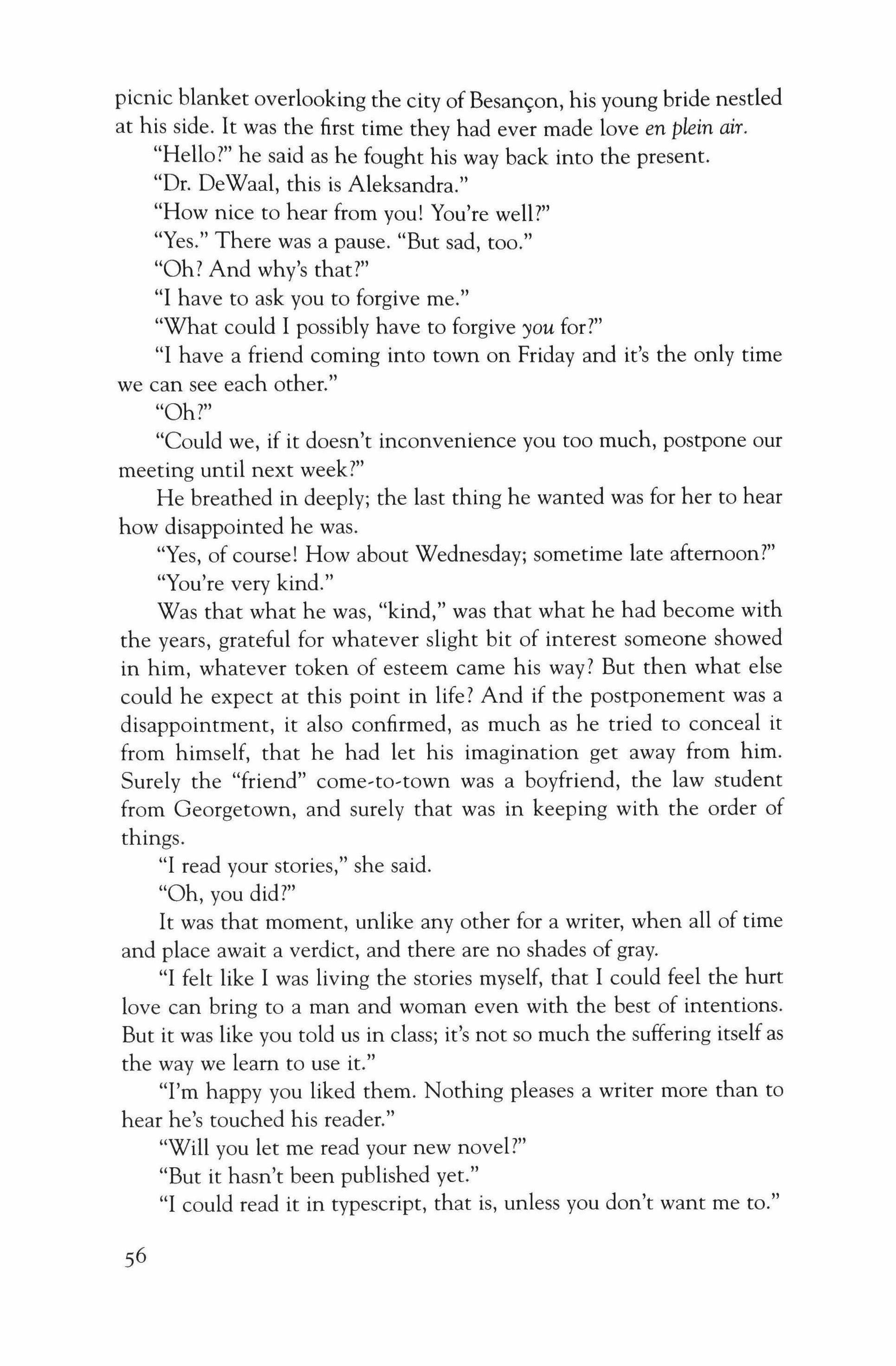
picnic blanket overlooking the city of Besancon, his young bride nestled at his side. It was the first time they had ever made love en plein air.
"Hello?" he said as he fought his way back into the present.
"Dr. DeWaal, this is Aleksandra."
"How nice to hear from you! You're well?"
"Yes." There was a pause. "But sad, too."
"Oh? And why's that?"
"I have to ask you to forgive me."
"What could I possibly have to forgive you for?"
"I have a friend coming into town on Friday and it's the only time we can see each other."
"Oh?"
"Could we, if it doesn't inconvenience you too much, postpone our meeting until next week?"
He breathed in deeply; the last thing he wanted was for her to hear how disappointed he was.
"Yes, of course! How about Wednesday; sometime late afternoon?"
"You're very kind."
Was that what he was, "kind," was that what he had become with the years, grateful for whatever slight bit of interest someone showed in him, whatever token of esteem came his way? But then what else could he expect at this point in life? And if the postponement was a disappointment, it also confirmed, as much as he tried to conceal it from himself, that he had let his imagination get away from him. Surely the "friend" come-to-town was a boyfriend, the law student from Georgetown, and surely that was in keeping with the order of things.
"I read your stories," she said.
"Oh, you did?"
It was that moment, unlike any other for a writer, when all of time and place await a verdict, and there are no shades of gray.
"I felt like I was living the stories myself, that I could feel the hurt love can bring to a man and woman even with the best of intentions. But it was like you told us in class; it's not so much the suffering itself as the way we learn to use it."
"I'm happy you liked them. Nothing pleases a writer more than to hear he's touched his reader."
"Will you let me read your new novel?"
"But it hasn't been published yet."
"I could read it in typescript, that is, unless you don't want me to."
56
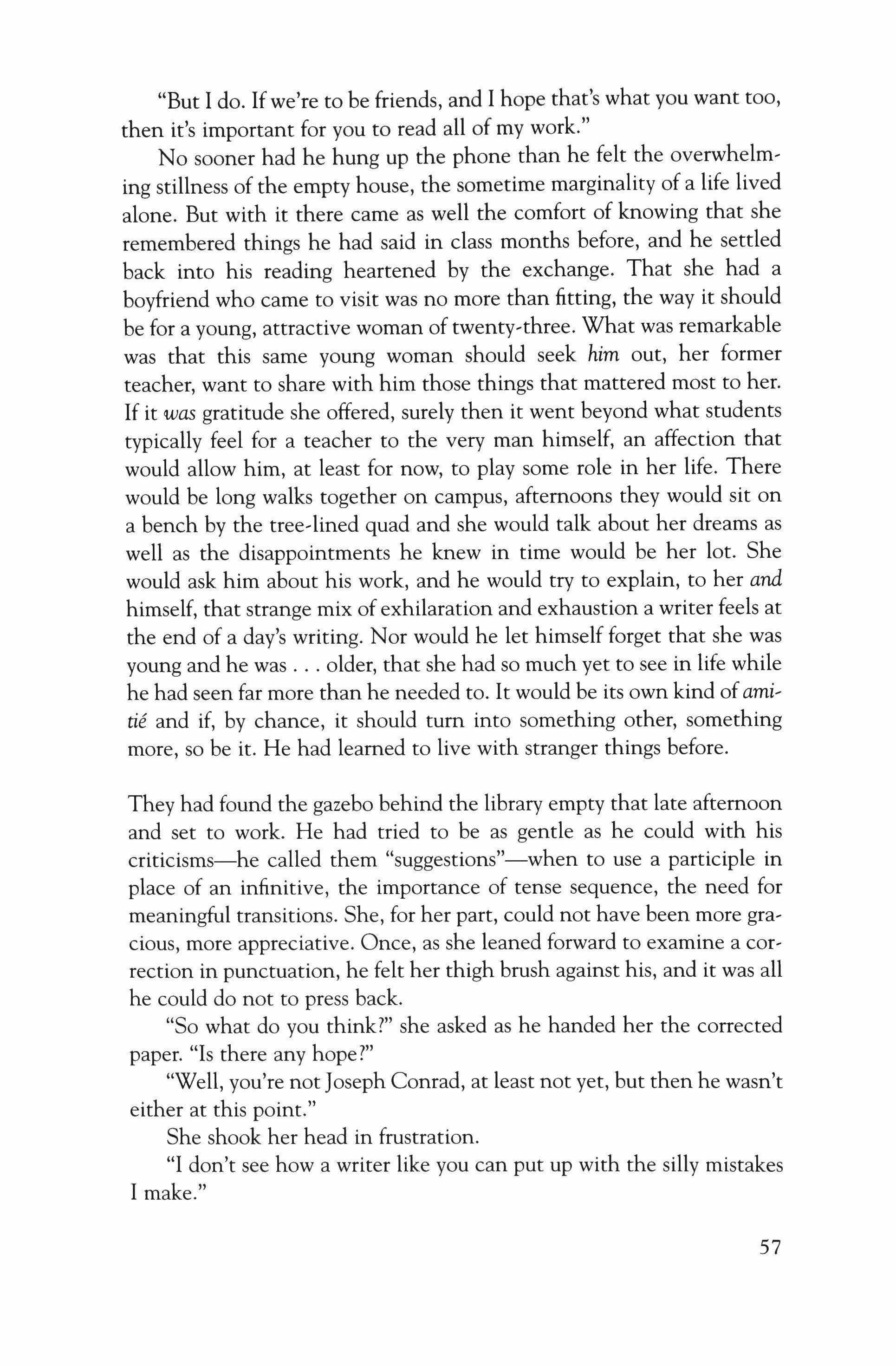
"But I do. Ifwe're to be friends, and I hope that's what you want too, then it's important for you to read all of my work."
No sooner had he hung up the phone than he felt the overwhelming stillness of the empty house, the sometime marginality of a life lived alone. But with it there came as well the comfort of knowing that she remembered things he had said in class months before, and he settled back into his reading heartened by the exchange. That she had a boyfriend who came to visit was no more than fitting, the way it should be for a young, attractive woman of twenty-three. What was remarkable was that this same young woman should seek him out, her former teacher, want to share with him those things that mattered most to her. If it was gratitude she offered, surely then it went beyond what students typically feel for a teacher to the very man himself, an affection that would allow him, at least for now, to play some role in her life. There would be long walks together on campus, afternoons they would sit on a bench by the tree-lined quad and she would talk about her dreams as well as the disappointments he knew in time would be her lot. She would ask him about his work, and he would try to explain, to her and himself, that strange mix of exhilaration and exhaustion a writer feels at the end of a day's writing. Nor would he let himself forget that she was young and he was older, that she had so much yet to see in life while he had seen far more than he needed to. It would be its own kind of amitie and if, by chance, it should tum into something other, something more, so be it. He had learned to live with stranger things before.
They had found the gazebo behind the library empty that late afternoon and set to work. He had tried to be as gentle as he could with his criticisms-he called them "suggestions"-when to use a participle in place of an infinitive, the importance of tense sequence, the need for meaningful transitions. She, for her part, could not have been more gracious, more appreciative. Once, as she leaned forward to examine a correction in punctuation, he felt her thigh brush against his, and it was all he could do not to press back.
"So what do you think?" she asked as he handed her the corrected paper. "Is there any hope?"
"Well, you're not Joseph Conrad, at least not yet, but then he wasn't either at this point."
She shook her head in frustration.
"I don't see how a writer like you can put up with the silly mistakes I make."
57
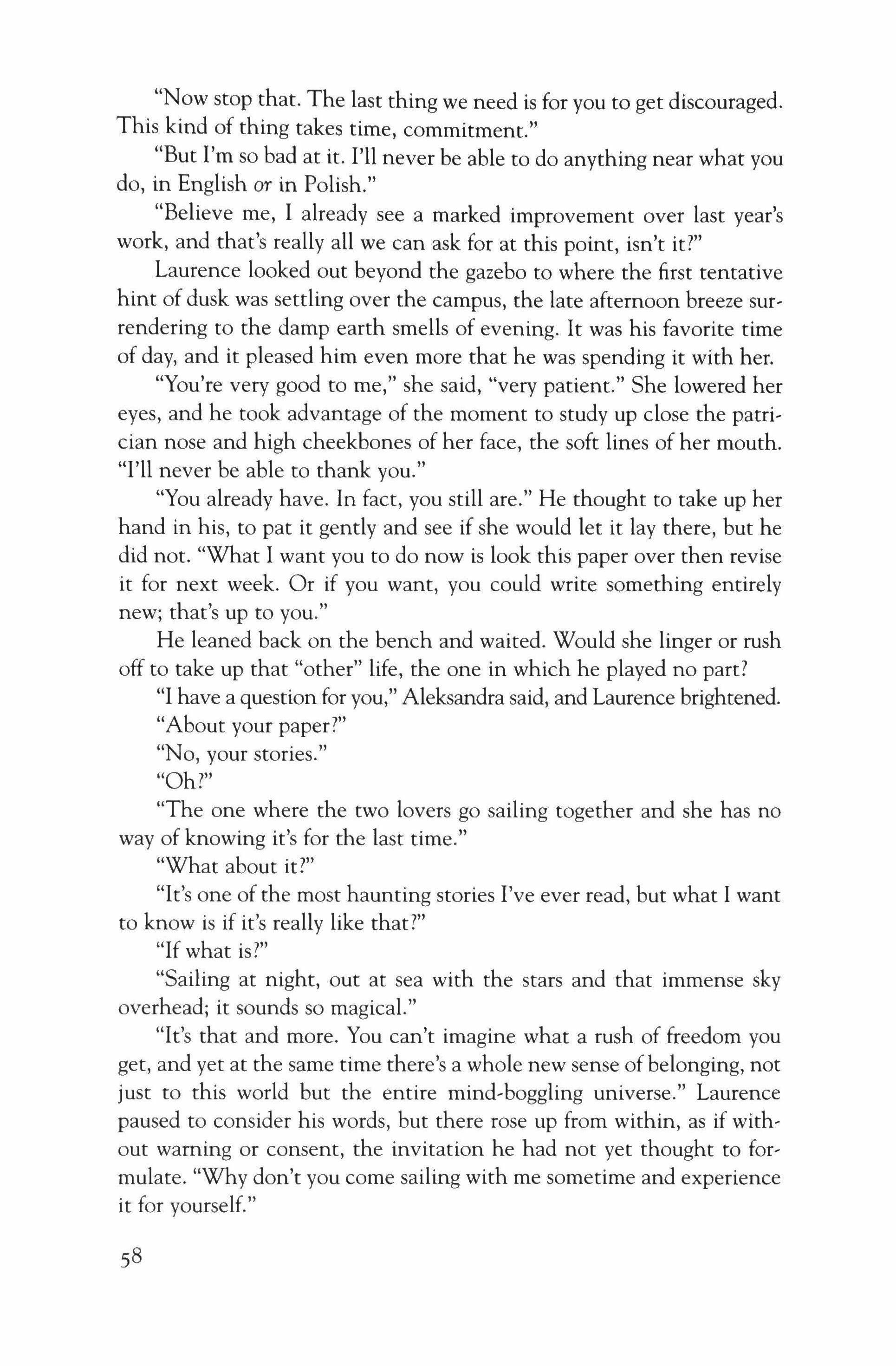
"Now stop that. The last thing we need is for you to get discouraged. This kind of thing takes time, commitment."
"But I'm so bad at it. I'll never be able to do anything near what you do, in English or in Polish."
"Believe me, I already see a marked improvement over last year's work, and that's really all we can ask for at this point, isn't it?"
Laurence looked out beyond the gazebo to where the first tentative hint of dusk was settling over the campus, the late afternoon breeze surrendering to the damp earth smells of evening. It was his favorite time of day, and it pleased him even more that he was spending it with her.
"You're very good to me," she said, "very patient." She lowered her eyes, and he took advantage of the moment to study up close the patrician nose and high cheekbones of her face, the soft lines of her mouth. "I'll never be able to thank you."
"You already have. In fact, you still are." He thought to take up her hand in his, to pat it gently and see if she would let it lay there, but he did not. "What I want you to do now is look this paper over then revise it for next week. Or if you want, you could write something entirely new; that's up to you."
He leaned back on the bench and waited. Would she linger or rush off to take up that "other" life, the one in which he played no part?
"I have a question for you," Aleksandra said, and Laurence brightened.
"About your paper?"
"No, your stories."
"Oh?"
"The one where the two lovers go sailing together and she has no way of knowing it's for the last time."
"What about it?"
"It's one of the most haunting stories I've ever read, but what I want to know is if it's really like that?"
"If what is?"
"Sailing at night, out at sea with the stars and that immense sky overhead; it sounds so magical."
"It's that and more. You can't imagine what a rush of freedom you get, and yet at the same time there's a whole new sense ofbelonging, not just to this world but the entire mind-boggling universe." Laurence paused to consider his words, but there rose up from within, as if without warning or consent, the invitation he had not yet thought to formulate. "Why don't you come sailing with me sometime and experience it for yourself."
58
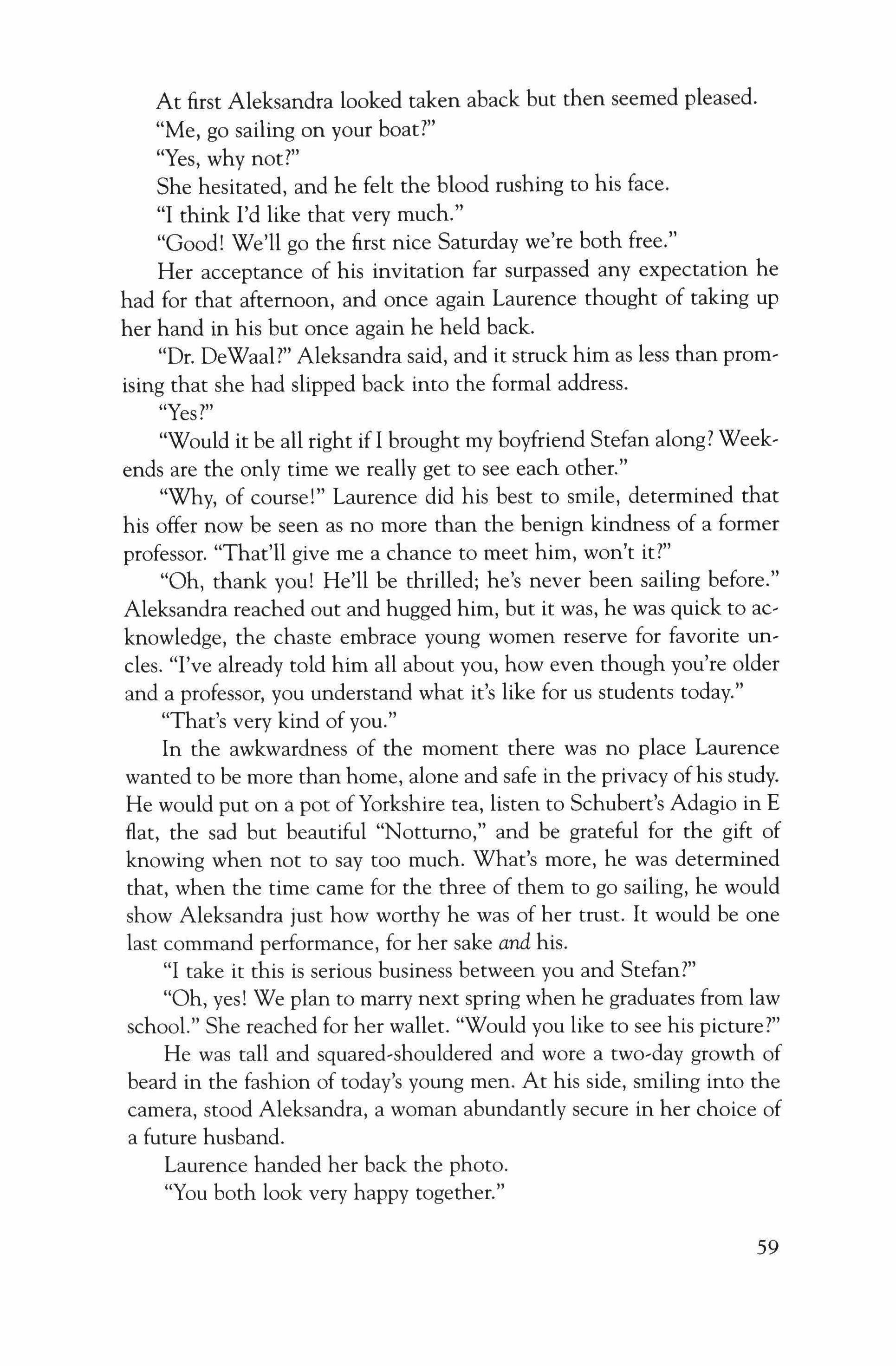
At first Aleksandra looked taken aback but then seemed pleased.
"Me, go sailing on your boat?"
"Yes, why not?"
She hesitated, and he felt the blood rushing to his face.
"I think I'd like that very much."
"Good! We'll go the first nice Saturday we're both free."
Her acceptance of his invitation far surpassed any expectation he had for that afternoon, and once again Laurence thought of taking up her hand in his but once again he held back.
"Dr. DeWaal?" Aleksandra said, and it struck him as less than promising that she had slipped back into the formal address.
"Yes?"
"Would it be all right if I brought my boyfriend Stefan along? Weekends are the only time we really get to see each other."
"Why, of course!" Laurence did his best to smile, determined that his offer now be seen as no more than the benign kindness of a former professor. "That'll give me a chance to meet him, won't it?"
"Oh, thank you! He'll be thrilled; he's never been sailing before." Aleksandra reached out and hugged him, but it was, he was quick to acknowledge, the chaste embrace young women reserve for favorite uncles. "I've already told him all about you, how even though you're older and a professor, you understand what it's like for us students today."
"That's very kind of you."
In the awkwardness of the moment there was no place Laurence wanted to be more than home, alone and safe in the privacy of his study. He would put on a pot of Yorkshire tea, listen to Schubert's Adagio in E flat, the sad but beautiful "Notturno," and be grateful for the gift of knowing when not to say too much. What's more, he was determined that, when the time came for the three of them to go sailing, he would show Aleksandra just how worthy he was of her trust. It would be one last command performance, for her sake and his.
"I take it this is serious business between you and Stefan?"
"Oh, yes! We plan to marry next spring when he graduates from law school." She reached for her wallet. "Would you like to see his picture?"
He was tall and squared-shouldered and wore a two-day growth of beard in the fashion of today's young men. At his side, smiling into the camera, stood Aleksandra, a woman abundantly secure in her choice of a future husband.
Laurence handed her back the photo.
"You both look very happy together."
59
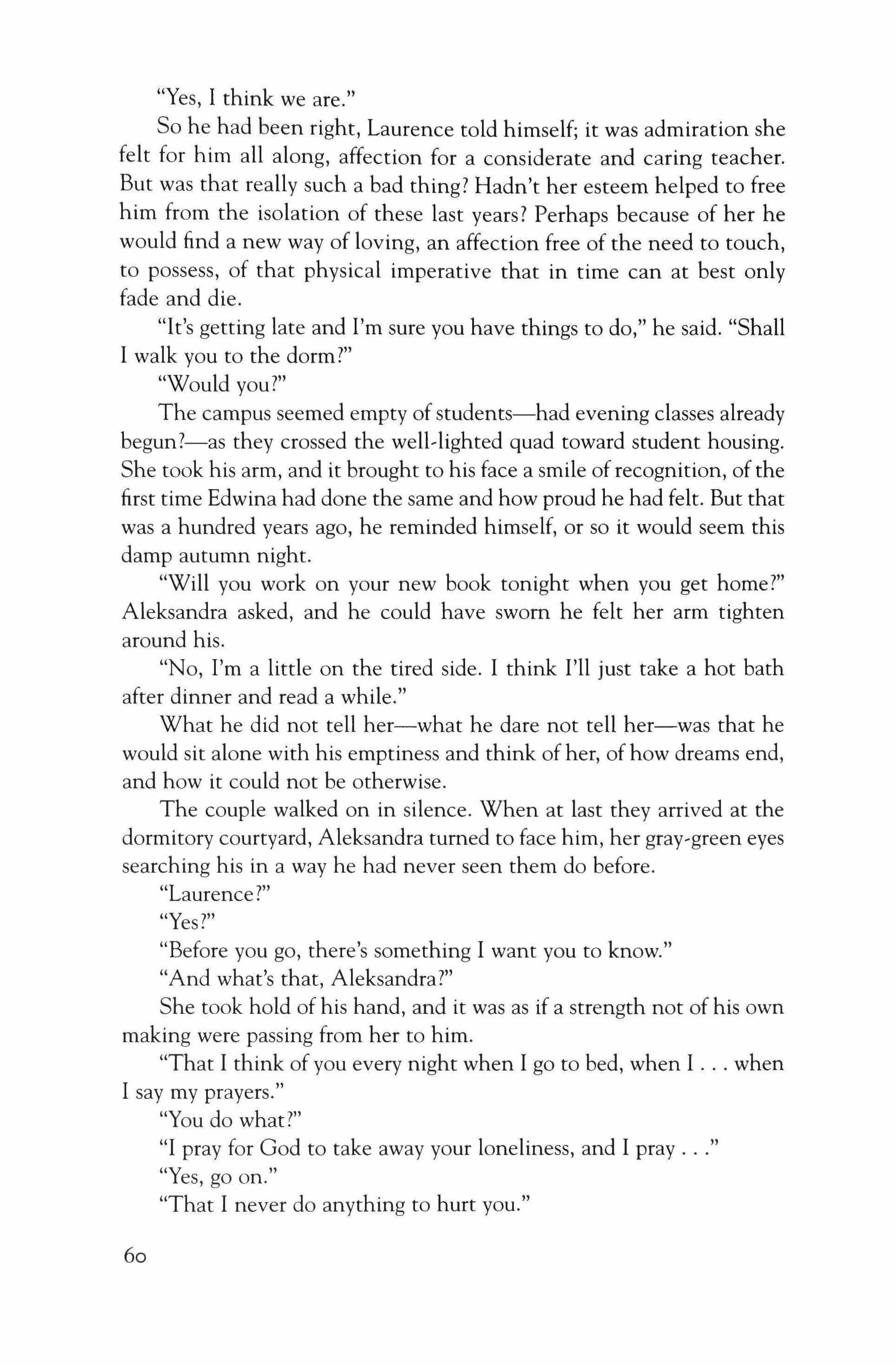
"Yes, I think we are."
So he had been right, Laurence told himself; it was admiration she felt for him all along, affection for a considerate and caring teacher. But was that really such a bad thing? Hadn't her esteem helped to free him from the isolation of these last years? Perhaps because of her he would find a new way of loving, an affection free of the need to touch, to possess, of that physical imperative that in time can at best only fade and die.
"It's getting late and I'm sure you have things to do," he said. "Shall I walk you to the dorm?"
"Would you?"
The campus seemed empty of students-had evening classes already begun?-as they crossed the well-lighted quad toward student housing. She took his arm, and it brought to his face a smile ofrecognition, of the first time Edwina had done the same and how proud he had felt. But that was a hundred years ago, he reminded himself, or so it would seem this damp autumn night.
"Will you work on your new book tonight when you get home?" Aleksandra asked, and he could have sworn he felt her arm tighten around his.
"No, I'm a little on the tired side. I think I'll just take a hot bath after dinner and read a while."
What he did not tell her-what he dare not tell her-was that he would sit alone with his emptiness and think ofher, of how dreams end, and how it could not be otherwise.
The couple walked on in silence. When at last they arrived at the dormitory courtyard, Aleksandra turned to face him, her gray-green eyes searching his in a way he had never seen them do before.
"Laurence?"
"Yes?"
"Before you go, there's something I want you to know."
"And what's that, Aleksandra?"
She took hold of his hand, and it was as if a strength not of his own making were passing from her to him.
"That I think of you every night when I go to bed, when I when I say my prayers."
"You do what?"
"I pray for God to take away your loneliness, and I pray "Yes, go on."
"That I never do anything to hurt you."
60
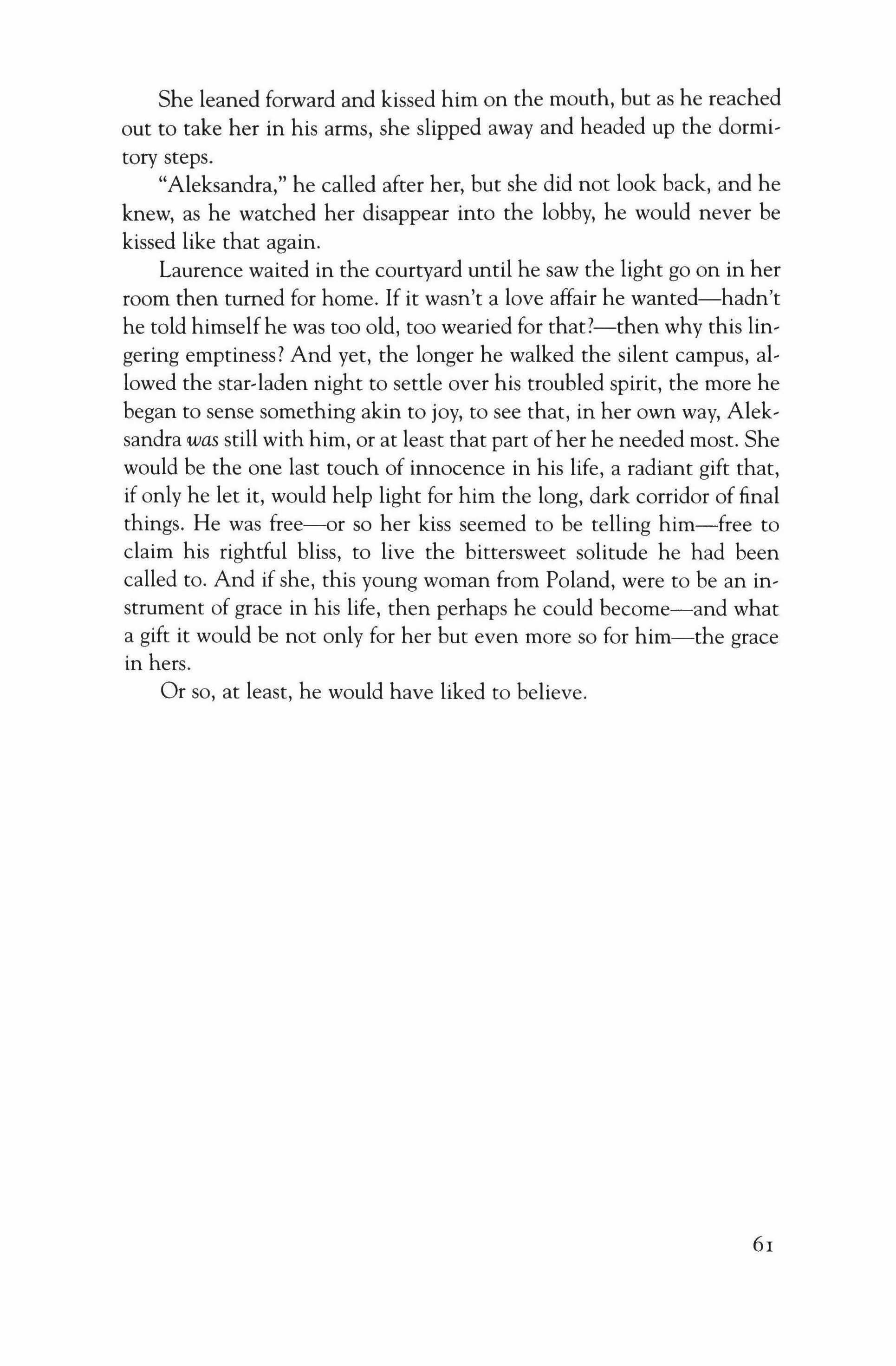
She leaned forward and kissed him on the mouth, but as he reached out to take her in his arms, she slipped away and headed up the dormitory steps.
"Aleksandra," he called after her, but she did not look back, and he knew, as he watched her disappear into the lobby, he would never be kissed like that again.
Laurence waited in the courtyard until he saw the light go on in her room then turned for home. If it wasn't a love affair he wanted-hadn't he told himself he was too old, too wearied for that?-then why this lin, gering emptiness? And yet, the longer he walked the silent campus, allowed the star,laden night to settle over his troubled spirit, the more he began to sense something akin to joy, to see that, in her own way, Aleksandra was still with him, or at least that part ofher he needed most. She would be the one last touch of innocence in his life, a radiant gift that, if only he let it, would help light for him the long, dark corridor of final things. He was free-or so her kiss seemed to be telling him-free to claim his rightful bliss, to live the bittersweet solitude he had been called to. And if she, this young woman from Poland, were to be an in, strument of grace in his life, then perhaps he could become-and what a gift it would be not only for her but even more so for him-the grace in hers.
Or so, at least, he would have liked to believe.
Sandra M. Gilbert
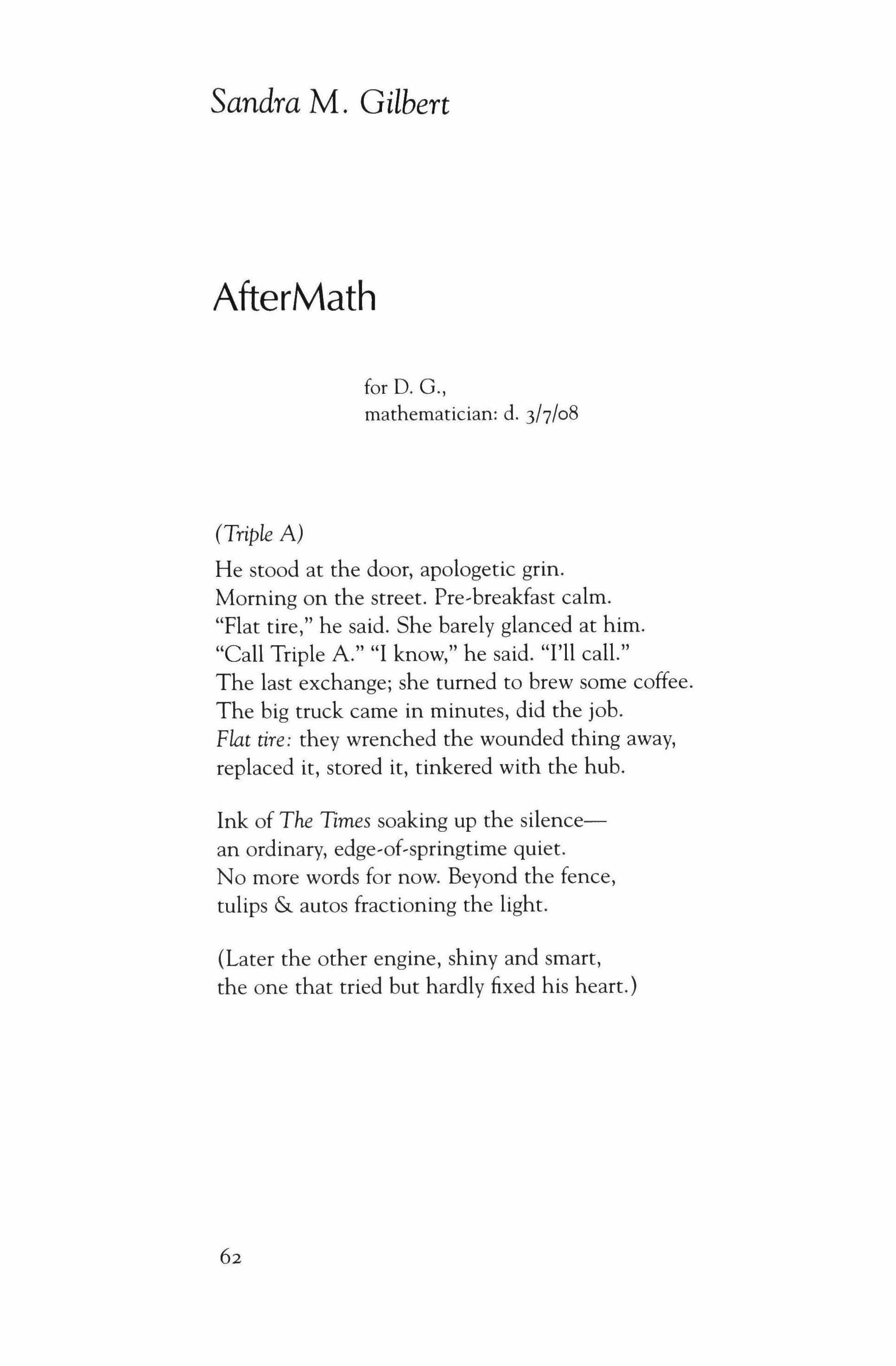
AfterMath
for D. G., mathematician: d. 317/08
(Triple A)
He stood at the door, apologetic grin. Morning on the street. Pre-breakfast calm. "Flat tire," he said. She barely glanced at him. "Call Triple A." "I know," he said. "I'll calL" The last exchange; she turned to brew some coffee. The big truck came in minutes, did the job. Flat tire: they wrenched the wounded thing away, replaced it, stored it, tinkered with the hub.
Ink of The Times soaking up the silencean ordinary, edge-of-springtime quiet. No more words for now. Beyond the fence, tulips & autos fractioning the light.
(Later the other engine, shiny and smart, the one that tried but hardly fixed his heart.)
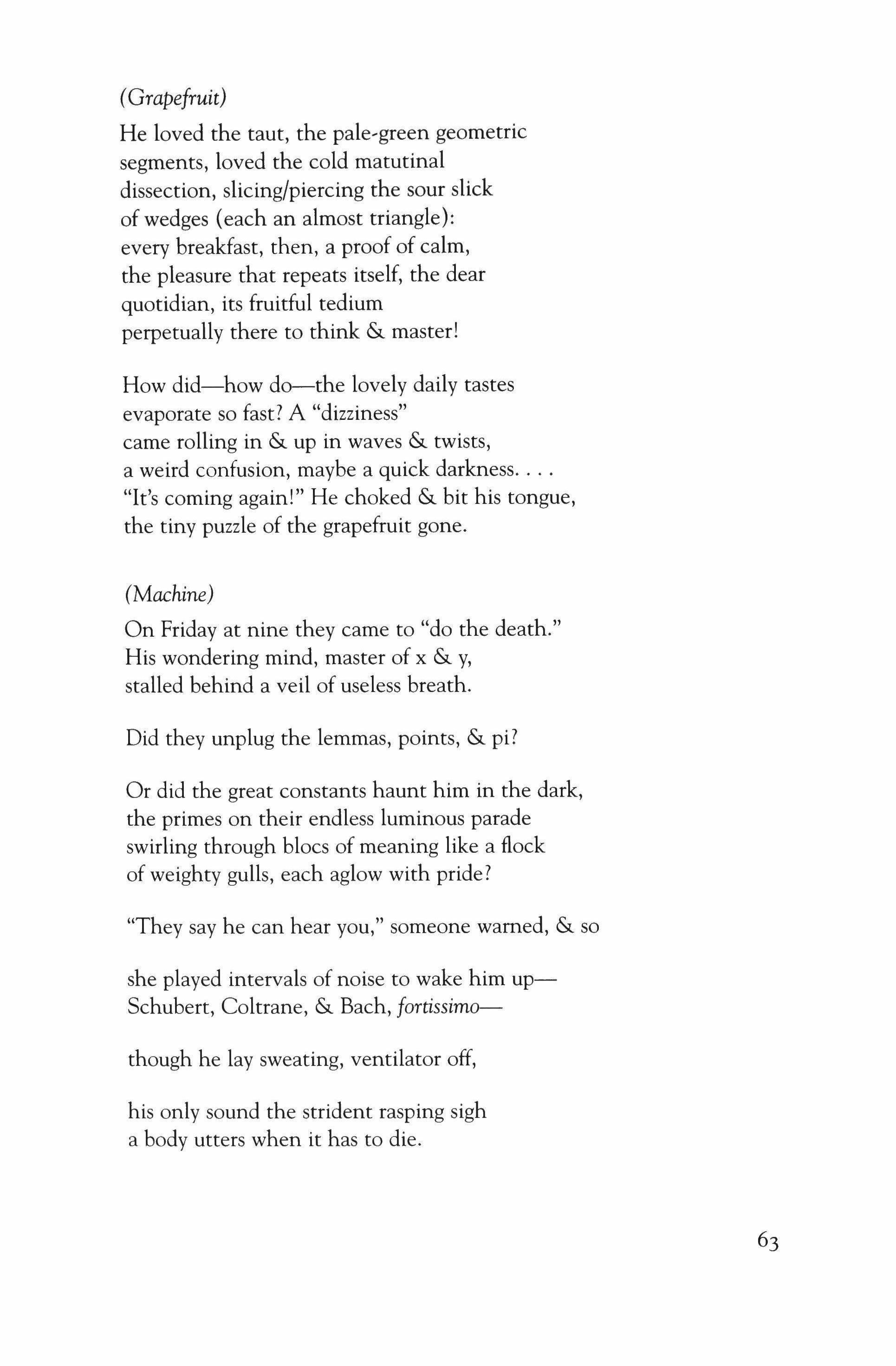
(Grapefruit)
He loved the taut, the pale-green geometric segments, loved the cold matutinal dissection, slicing/piercing the sour slick of wedges (each an almost triangle): every breakfast, then, a proof of calm, the pleasure that repeats itself, the dear quotidian, its fruitful tedium perpetually there to think & master!
How did-how do--the lovely daily tastes evaporate so fast? A "dizziness" came rolling in & up in waves & twists, a weird confusion, maybe a quick darkness "It's coming again!" He choked & bit his tongue, the tiny puzzle of the grapefruit gone.
(Machine)
On Friday at nine they came to "do the death." His wondering mind, master of x & y, stalled behind a veil of useless breath.
Did they unplug the lemmas, points, & pi?
Or did the great constants haunt him in the dark, the primes on their endless luminous parade swirling through blocs of meaning like a flock of weighty gulls, each aglow with pride?
"They say he can hear you," someone warned, & so
she played intervals of noise to wake him upSchubert, Coltrane, & Bach, fortissimothough he lay sweating, ventilator off, his only sound the strident rasping sigh a body utters when it has to die.
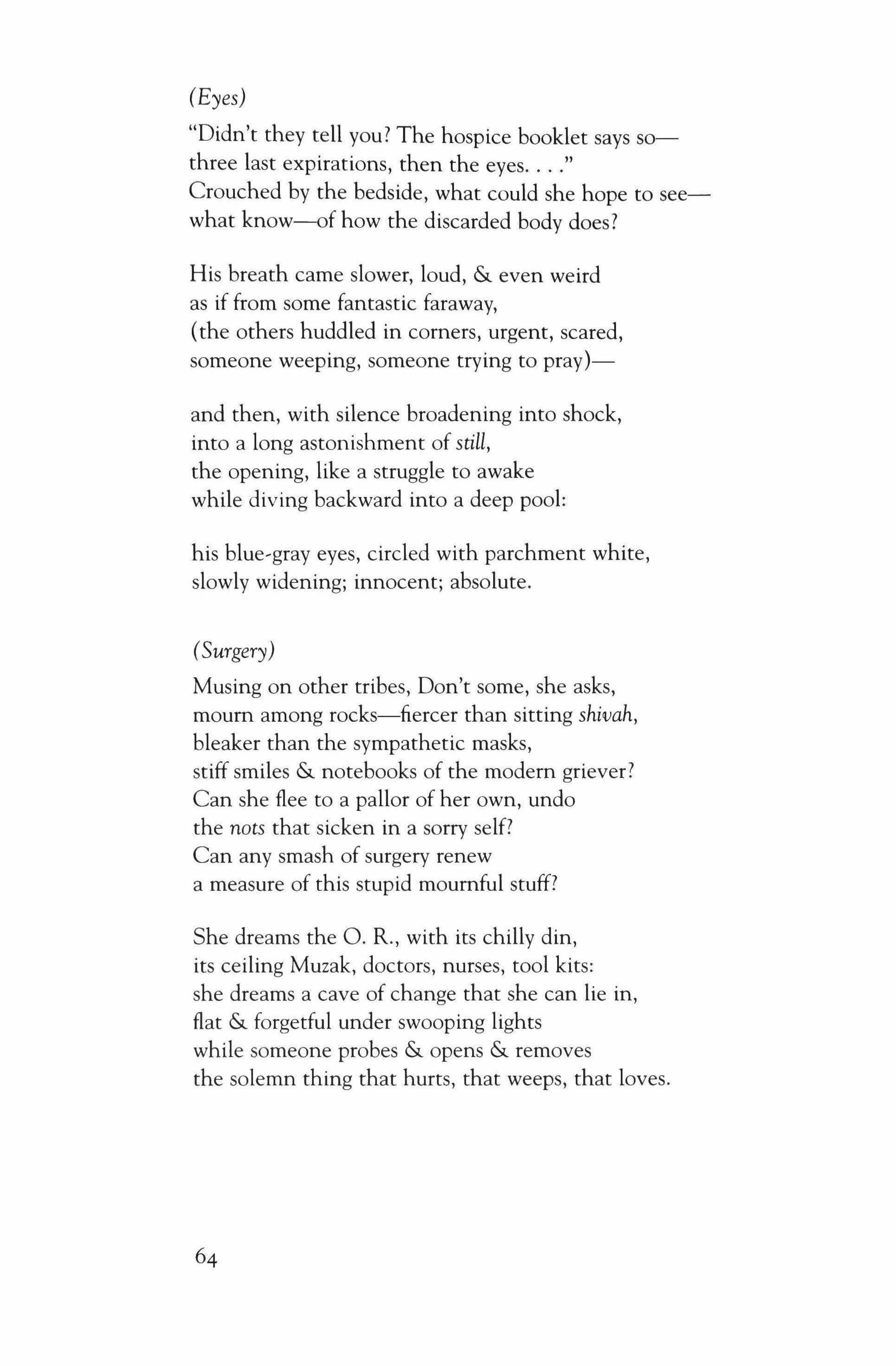
(Eyes)
"Didn't they tell you? The hospice booklet says sothree last expirations, then the eyes Crouched by the bedside, what could she hope to seewhat know-of how the discarded body does?
His breath came slower, loud, & even weird as if from some fantastic faraway, (the others huddled in corners, urgent, scared, someone weeping, someone trying to pray)-
and then, with silence broadening into shock, into a long astonishment of still, the opening, like a struggle to awake while diving backward into a deep pool: his blue-gray eyes, circled with parchment white, slowly widening; innocent; absolute.
(Surgery)
Musing on other tribes, Don't some, she asks, mourn among rocks-fiercer than sitting shivah, bleaker than the sympathetic masks, stiff smiles & notebooks of the modern griever? Can she flee to a pallor of her own, undo the nots that sicken in a sorry self?
Can any smash of surgery renew a measure of this stupid mournful stuff?
She dreams the O. R., with its chilly din, its ceiling Muzak, doctors, nurses, tool kits: she dreams a cave of change that she can lie in, flat & forgetful under swooping lights while someone probes & opens & removes the solemn thing that hurts, that weeps, that loves.
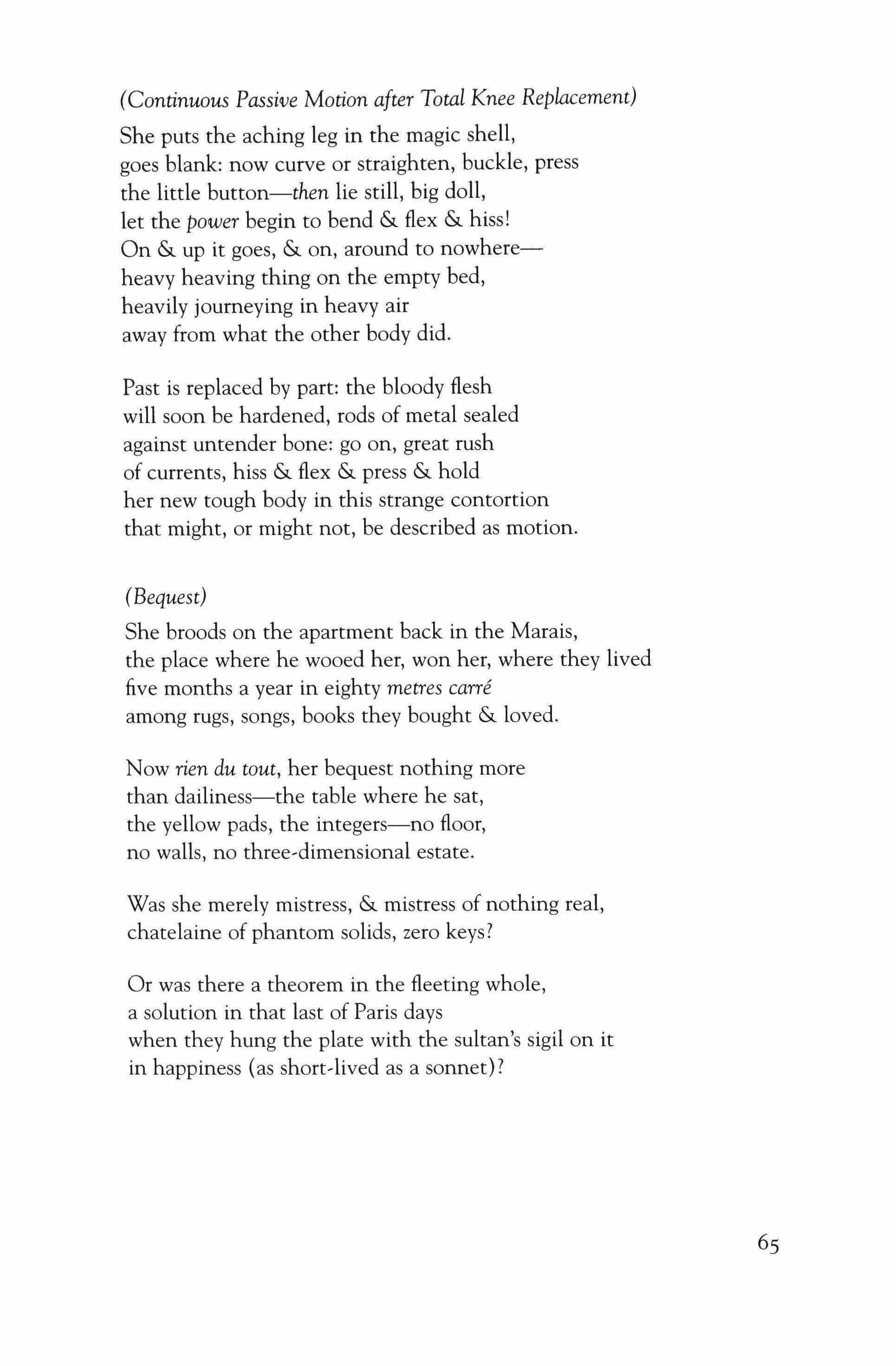
(Continuous Passive Motion after Total Knee Replacement)
She puts the aching leg in the magic shell, goes blank: now curve or straighten, buckle, press the little button-then lie still, big doll, let the power begin to bend & flex & hiss! On & up it goes, & on, around to nowhereheavy heaving thing on the empty bed, heavily journeying in heavy air away from what the other body did.
Past is replaced by part: the bloody flesh will soon be hardened, rods of metal sealed against untender bone: go on, great rush of currents, hiss & flex & press & hold her new tough body in this strange contortion that might, or might not, be described as motion.
(Bequest)
She broods on the apartment back in the Marais, the place where he wooed her, won her, where they lived five months a year in eighty metres carte among rugs, songs, books they bought & loved.
Now rien du tout, her bequest nothing more than dailiness-the table where he sat, the yellow pads, the integers-no floor, no walls, no three-dimensional estate.
Was she merely mistress, & mistress of nothing real, chatelaine of phantom solids, zero keys?
Or was there a theorem in the fleeting whole, a solution in that last of Paris days when they hung the plate with the sultan's sigil on it in happiness (as short-lived as a sonnet)?
65
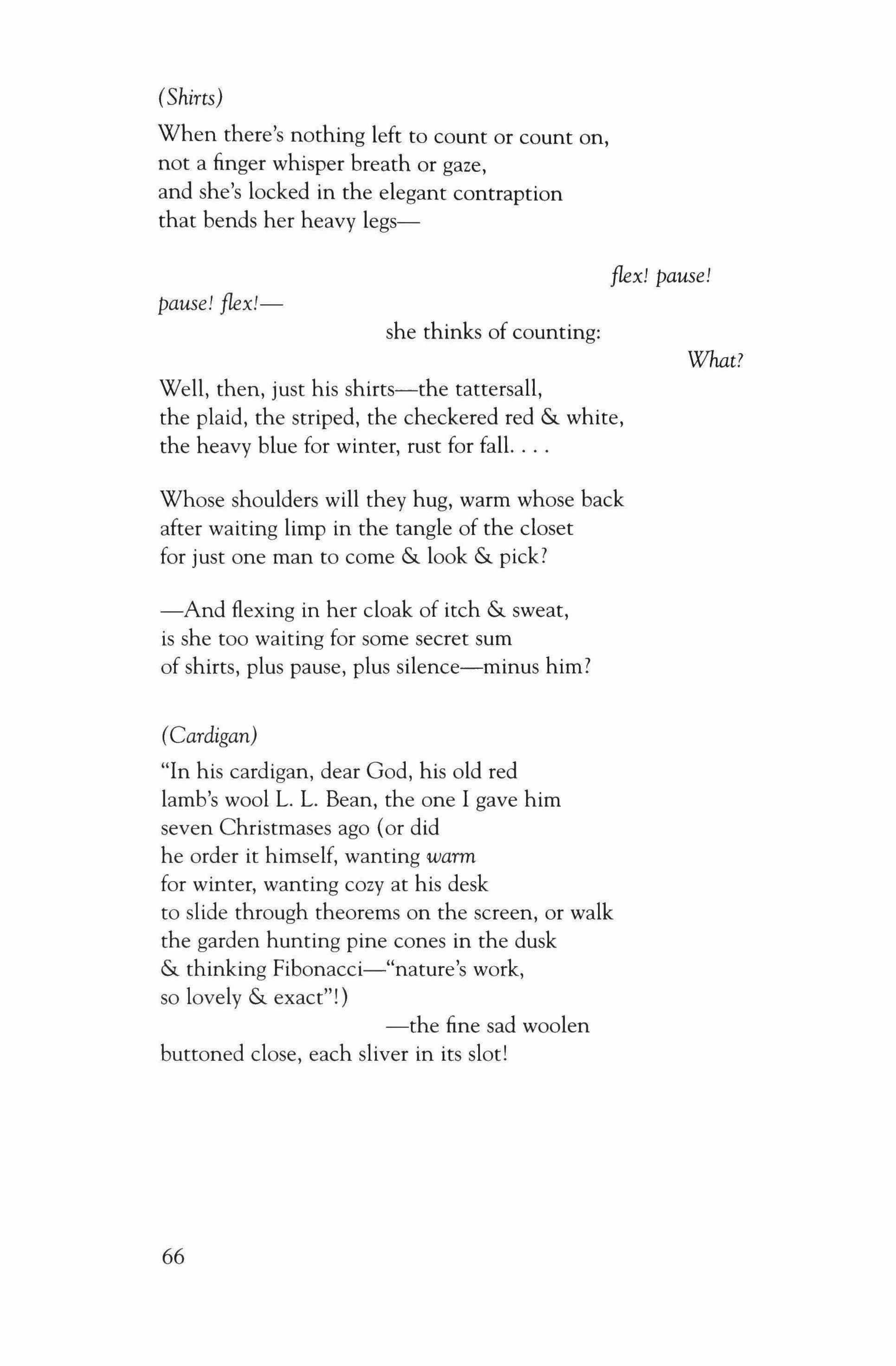
(Shirts)
When there's nothing left to count or count on, not a finger whisper breath or gaze, and she's locked in the elegant contraption that bends her heavy legs-
flex! pause! pause! flex!she thinks of counting: What?
Well, then, just his shirts-the tattersall, the plaid, the striped, the checkered red & white, the heavy blue for winter, rust for fall.
Whose shoulders will they hug, warm whose back after waiting limp in the tangle of the closet for just one man to come & look & pick?
-And flexing in her cloak of itch & sweat, is she too waiting for some secret sum of shirts, plus pause, plus silence-minus him?
(Cardigan)
"In his cardigan, dear God, his old red lamb's wool L. L. Bean, the one I gave him seven Christmases ago (or did he order it himself, wanting warm for winter, wanting cozy at his desk to slide through theorems on the screen, or walk the garden hunting pine cones in the dusk & thinking Fibonacci-"nature's work, so lovely & exact"!)
-the fine sad woolen buttoned close, each sliver in its slot!
66
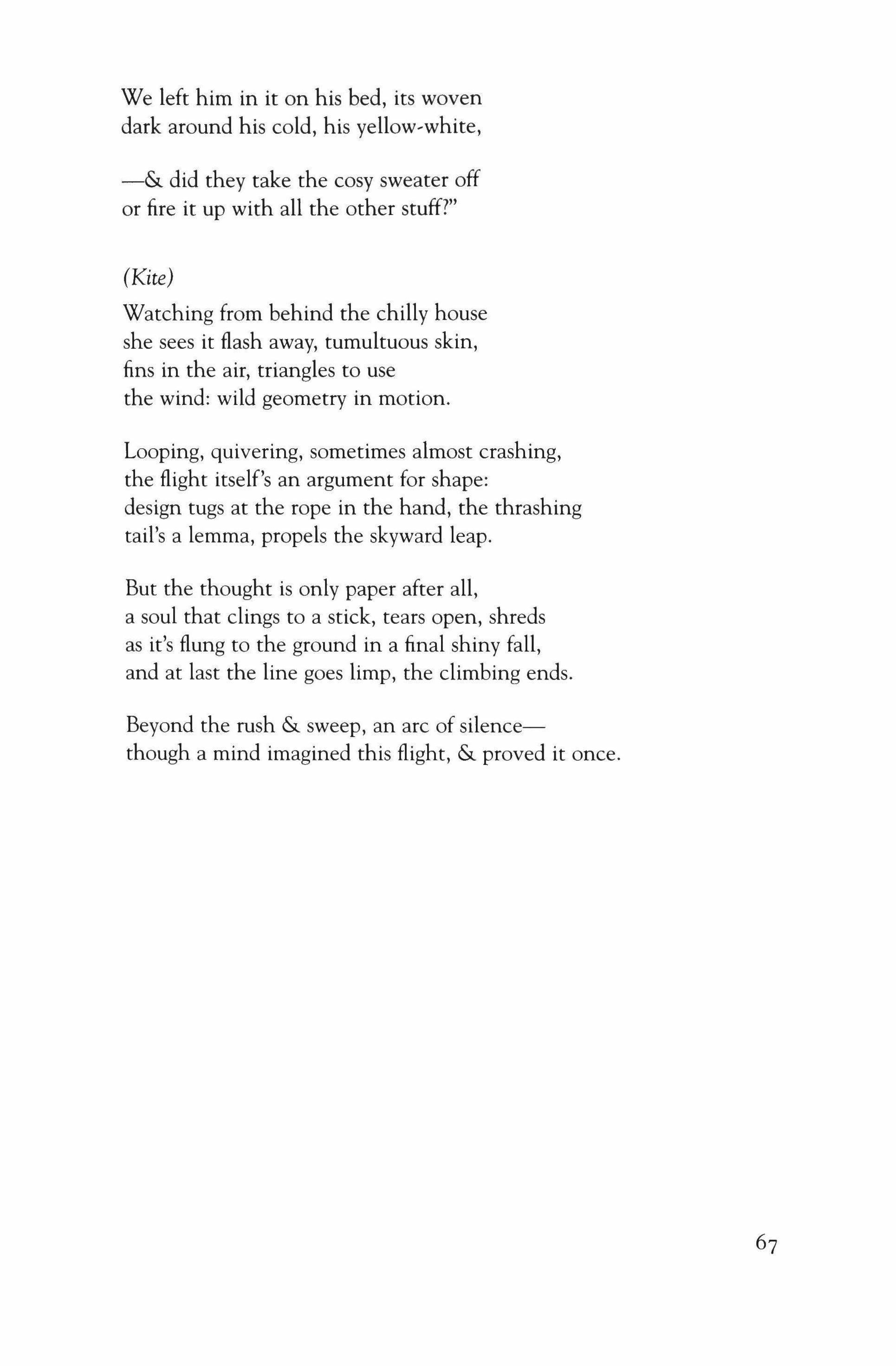
We left him in it on his bed, its woven dark around his cold, his yellow-white,
-& did they take the cosy sweater off or fire it up with all the other stuff?"
(Kite)
Watching from behind the chilly house she sees it flash away, tumultuous skin, fins in the air, triangles to use the wind: wild geometry in motion.
Looping, quivering, sometimes almost crashing, the flight itself's an argument for shape: design tugs at the rope in the hand, the thrashing tail's a lemma, propels the skyward leap.
But the thought is only paper after all, a soul that clings to a stick, tears open, shreds as it's flung to the ground in a final shiny fall, and at last the line goes limp, the climbing ends.
Beyond the rush & sweep, an arc of silencethough a mind imagined this flight, & proved it once.
Debora Greger
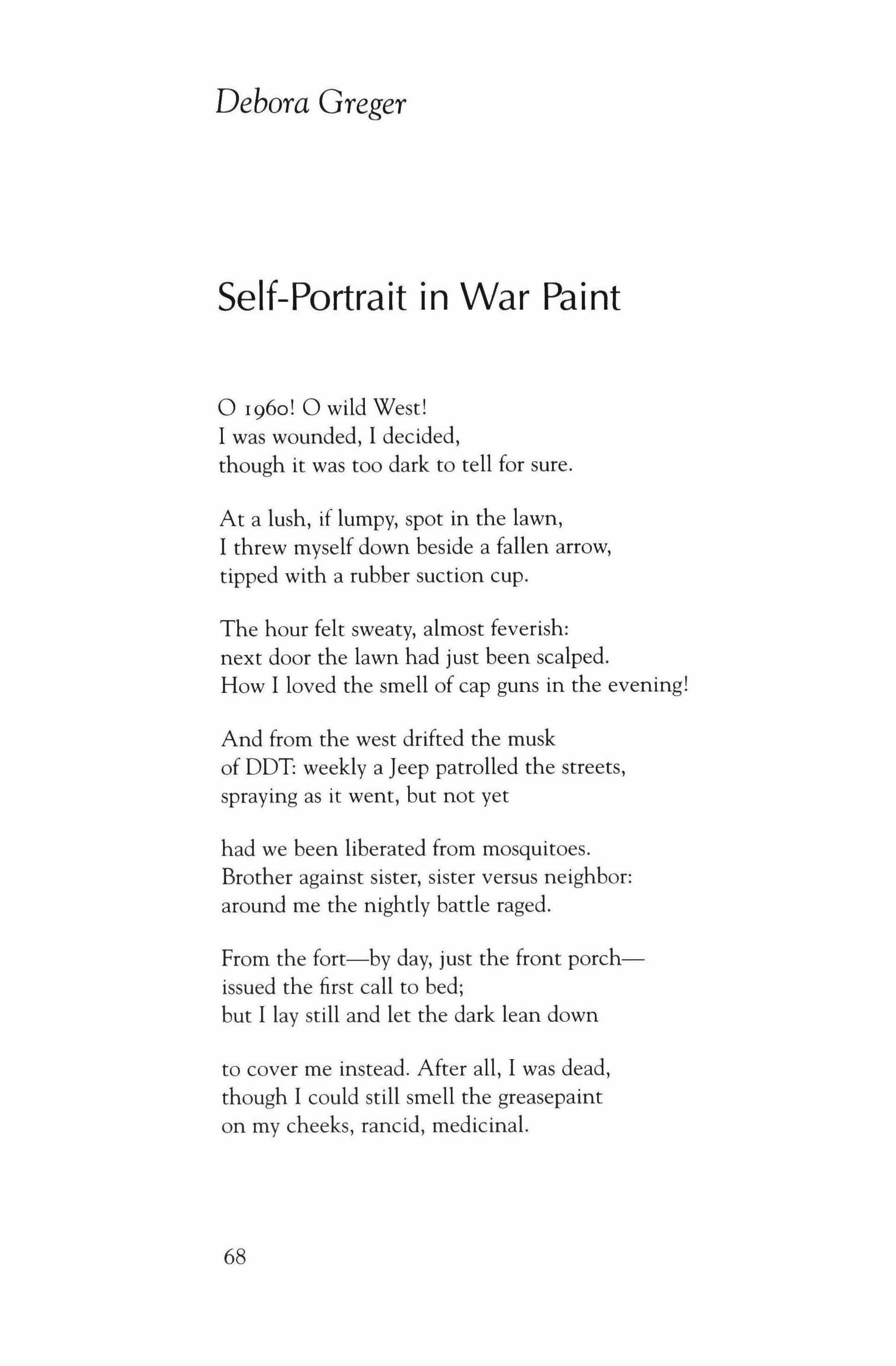
Self-Portrait in War Paint
o I960! 0 wild West!
I was wounded, I decided, though it was too dark to tell for sure.
At a lush, if lumpy, spot in the lawn, I threw myself down beside a fallen arrow, tipped with a rubber suction cup.
The hour felt sweaty, almost feverish: next door the lawn had just been scalped. How I loved the smell of cap guns in the evening!
And from the west drifted the musk of DDT: weekly a Jeep patrolled the streets, spraying as it went, but not yet
had we been liberated from mosquitoes. Brother against sister, sister versus neighbor: around me the nightly battle raged.
From the fort-by day, just the front porchissued the first call to bed; but I lay still and let the dark lean down
to cover me instead. After all, I was dead, though I could still smell the greasepaint on my cheeks, rancid, medicinal.
68
The Fall of Eve
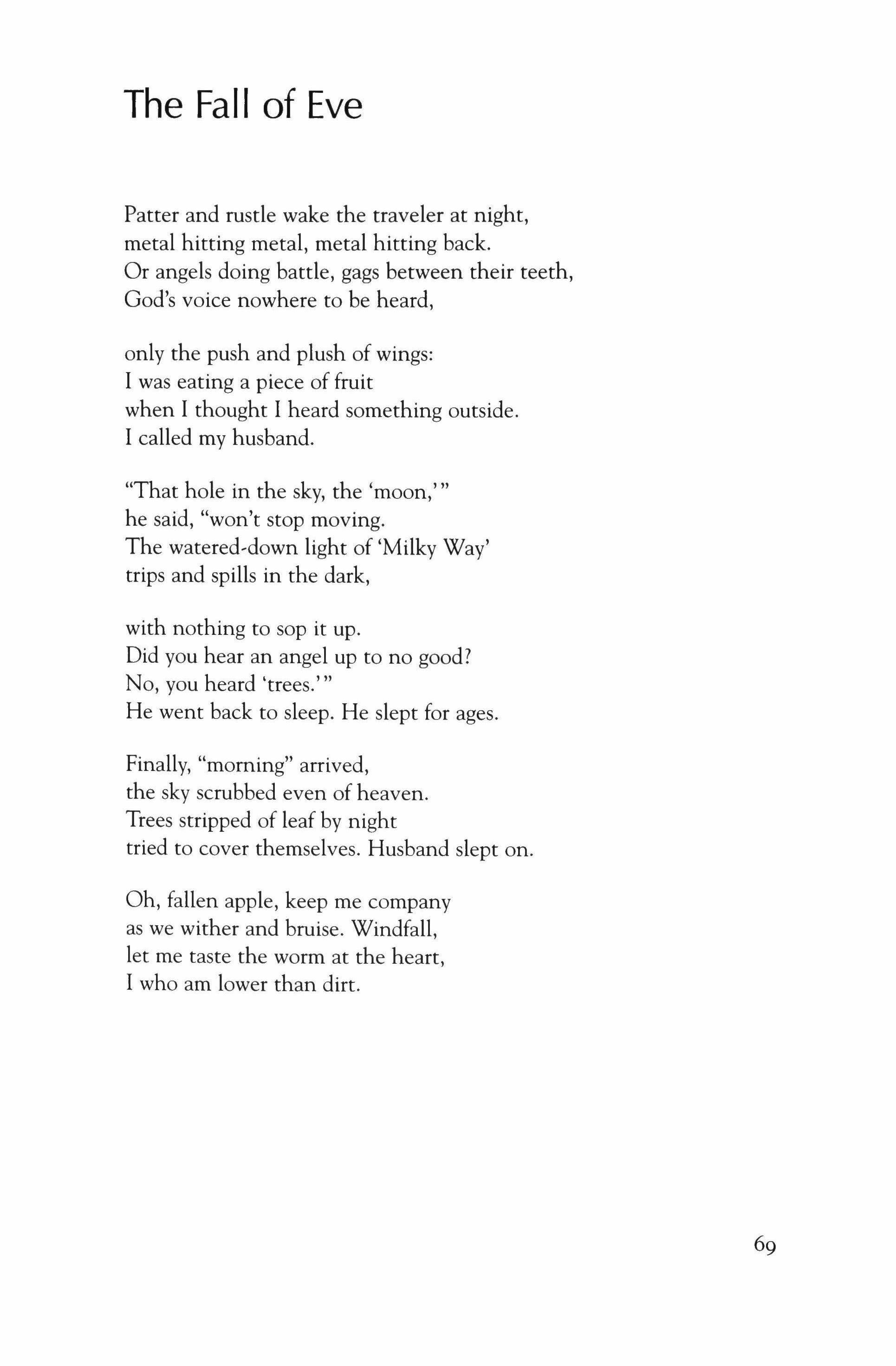
Patter and rustle wake the traveler at night, metal hitting metal, metal hitting back. Or angels doing battle, gags between their teeth, God's voice nowhere to be heard, only the push and plush of wings: I was eating a piece of fruit when I thought I heard something outside. I called my husband.
"That hole in the sky, the 'moon,''' he said, "won't stop moving. The watered-down light of 'Milky Way' trips and spills in the dark, with nothing to sop it up. Did you hear an angel up to no good? No, you heard 'trees." He went back to sleep. He slept for ages.
Finally, "morning" arrived, the sky scrubbed even of heaven. Trees stripped of leaf by night tried to cover themselves. Husband slept on.
Oh, fallen apple, keep me company as we wither and bruise. Windfall, let me taste the worm at the heart, I who am lower than dirt.
Lost Photograph, Circa 1975
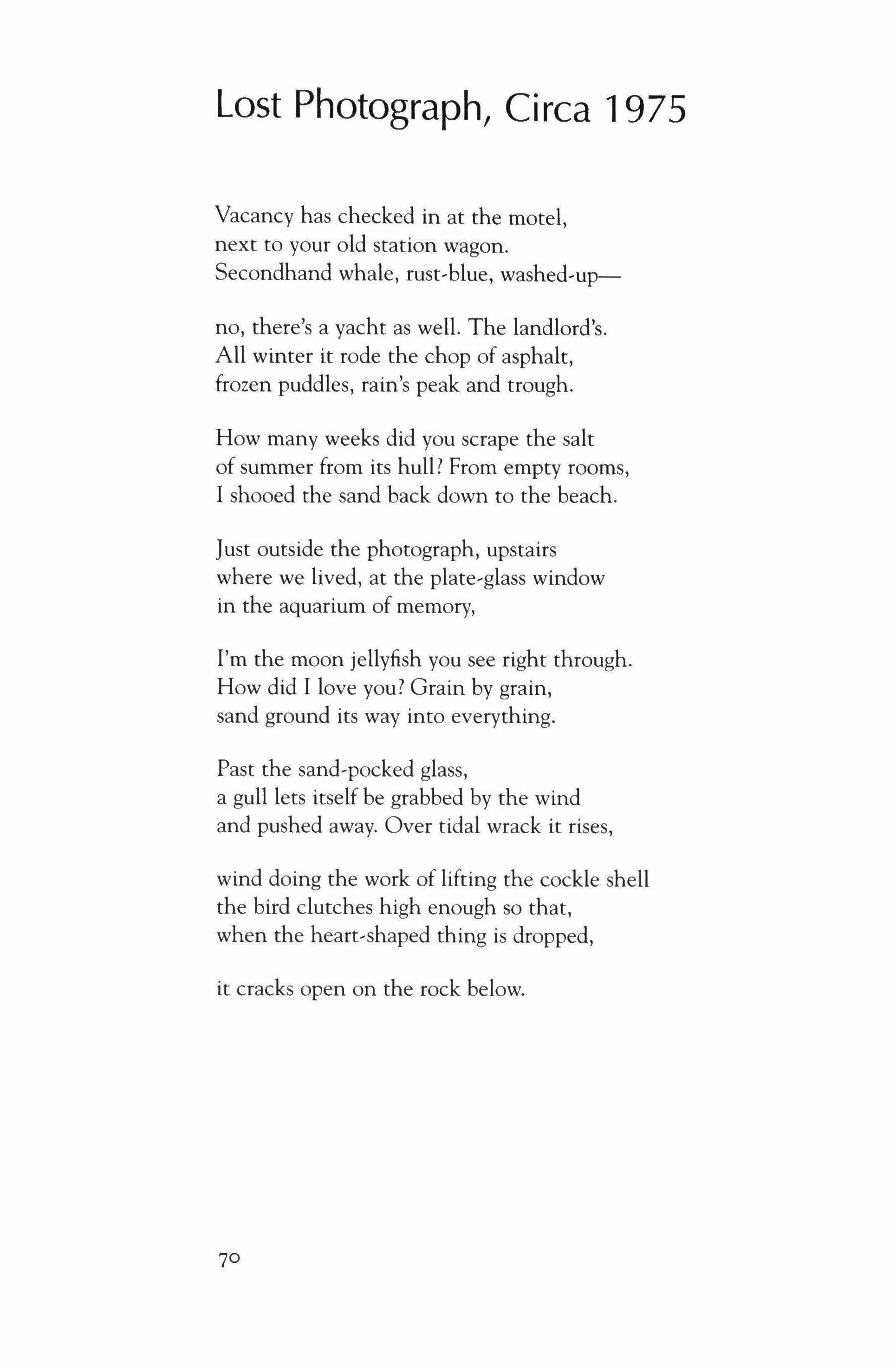
Vacancy has checked in at the motel, next to your old station wagon. Secondhand whale, rust-blue, washed-up-
no, there's a yacht as well. The landlord's. All winter it rode the chop of asphalt, frozen puddles, rain's peak and trough.
How many weeks did you scrape the salt of summer from its hull? From empty rooms, 1 shooed the sand back down to the beach.
Just outside the photograph, upstairs where we lived, at the plate-glass window in the aquarium of memory,
I'm the moon jellyfish you see right through. How did 1 love you? Grain by grain, sand ground its way into everything.
Past the sand-pocked glass, a gull lets itself be grabbed by the wind and pushed away. Over tidal wrack it rises,
wind doing the work of lifting the cockle shell the bird clutches high enough so that, when the heart-shaped thing is dropped, it cracks open on the rock below.
Carol Frost
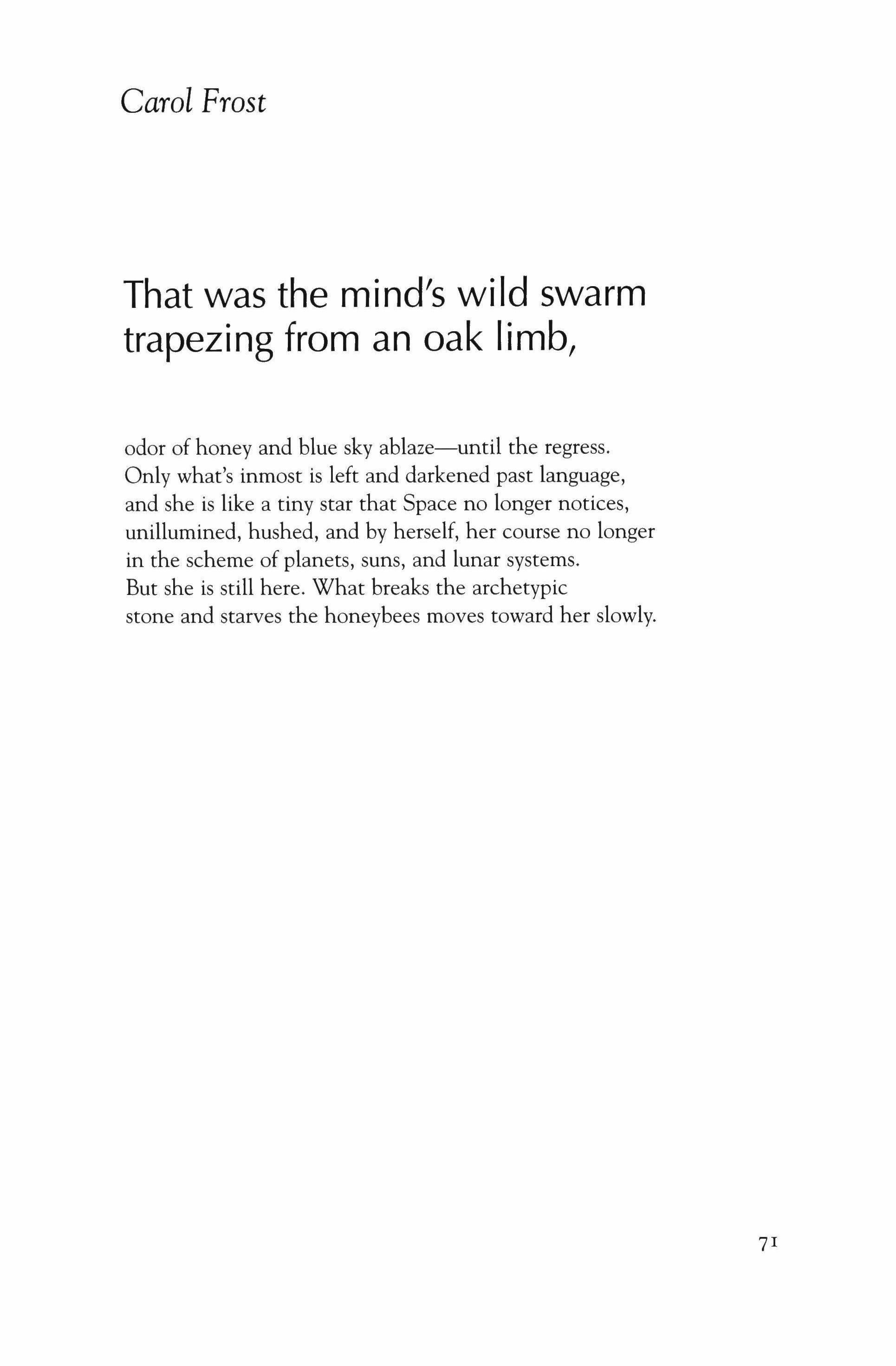
That
was the mind's wild swarm
trapezing
from an oak limb, odor of honey and blue sky ablaze-until the regress. Only what's inmost is left and darkened past language, and she is like a tiny star that Space no longer notices, unillumined, hushed, and by herself, her course no longer in the scheme of planets, suns, and lunar systems. But she is still here. What breaks the archetypic stone and starves the honeybees moves toward her slowly.
71
She wears geegaws from relatives
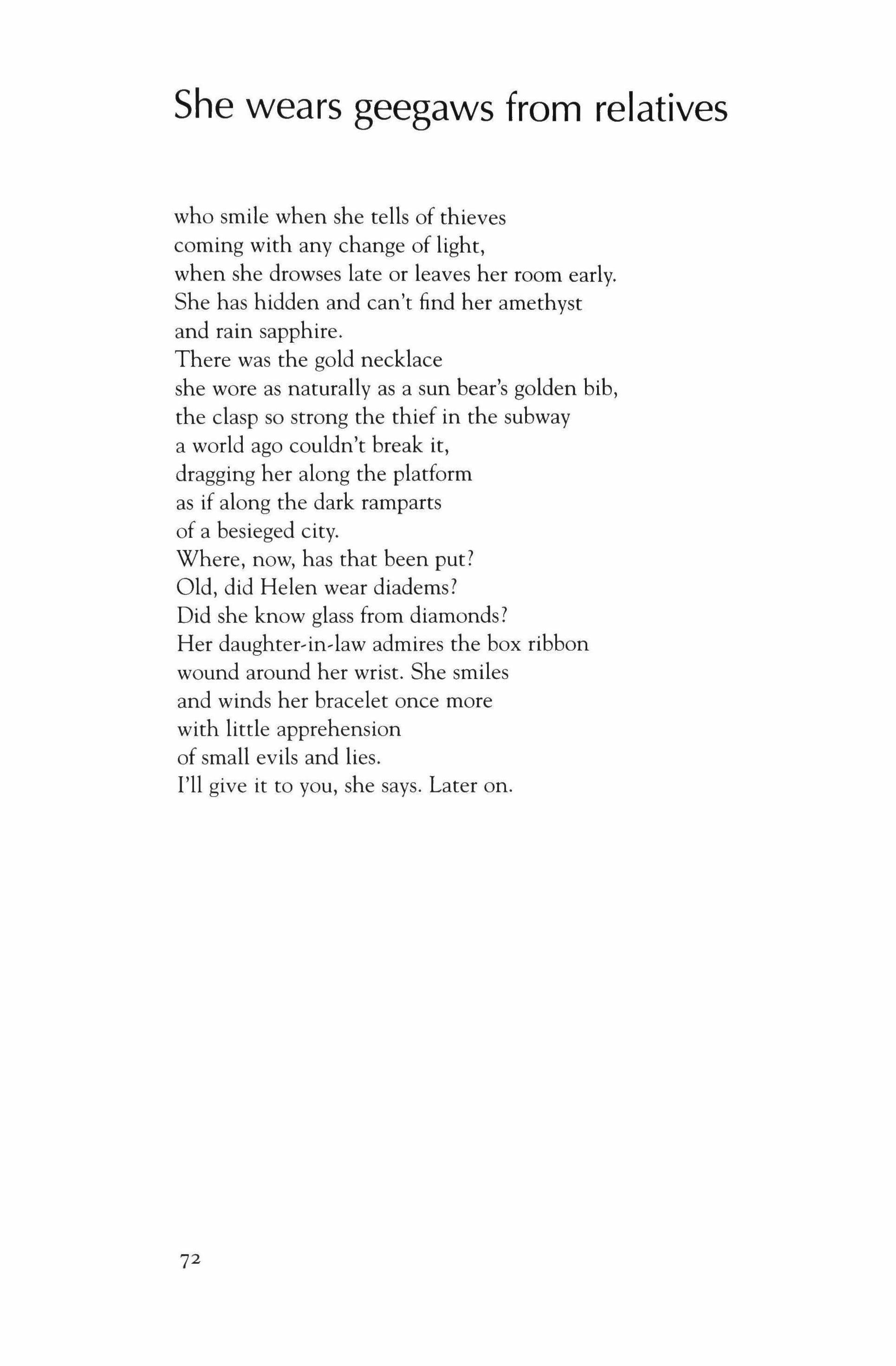
who smile when she tells of thieves coming with any change of light, when she drowses late or leaves her room early. She has hidden and can't find her amethyst and rain sapphire.
There was the gold necklace she wore as naturally as a sun bear's golden bib, the clasp so strong the thief in the subway a world ago couldn't break it, dragging her along the platform as if along the dark ramparts of a besieged city. Where, now, has that been put? Old, did Helen wear diadems? Did she know glass from diamonds? Her daughter-in-law admires the box ribbon wound around her wrist. She smiles and winds her bracelet once more with little apprehension of small evils and lies. I'll give it to you, she says. Later on.
She saw the tortured dream wrestled to the floor
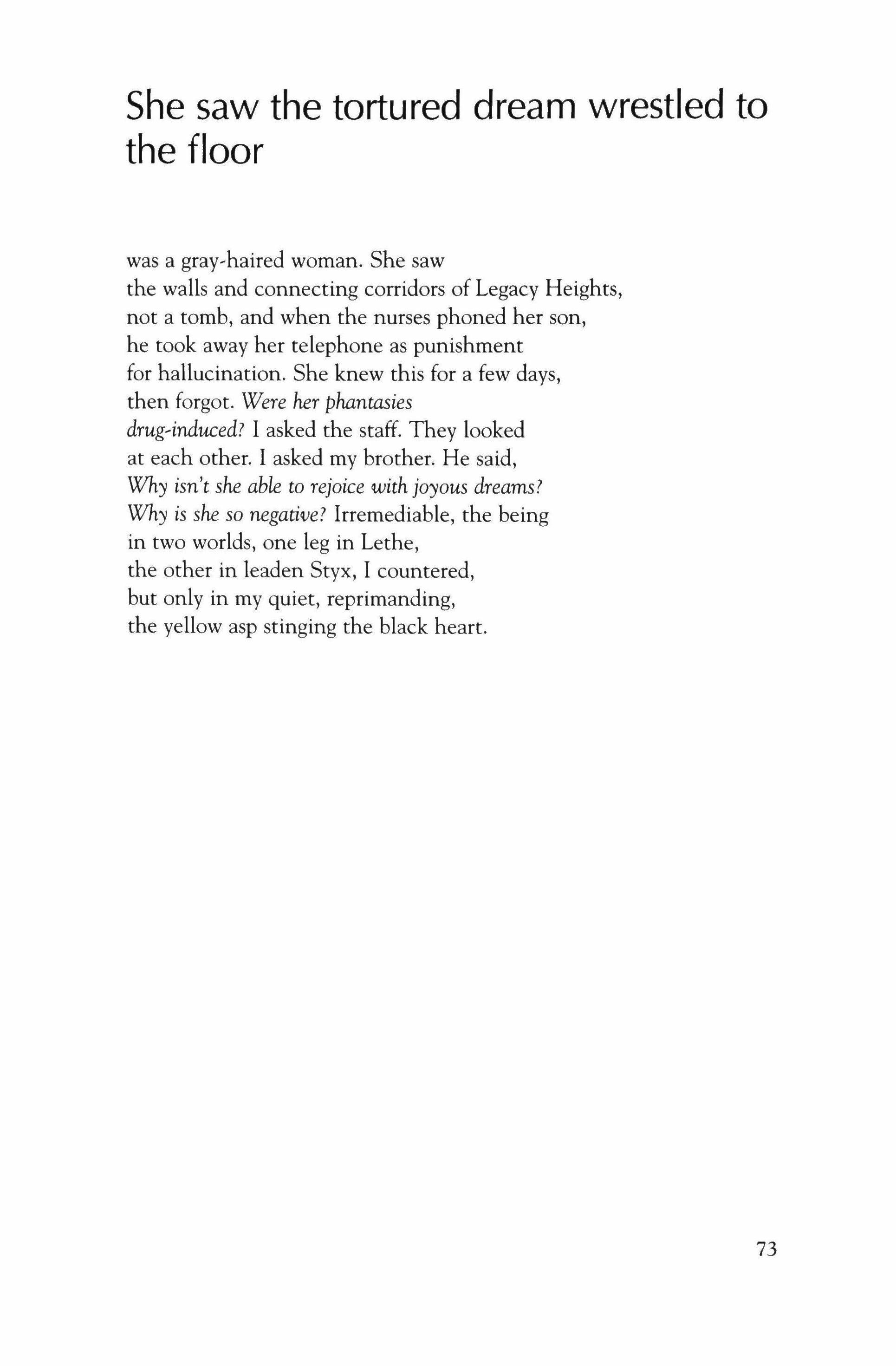
was a gray-haired woman. She saw the walls and connecting corridors of Legacy Heights, not a tomb, and when the nurses phoned her son, he took away her telephone as punishment for hallucination. She knew this for a few days, then forgot. Were her phantasies drug�induced? I asked the staff. They looked at each other. I asked my brother. He said, Why isn't she able to rejoice with joyous dreams? Why is she so negative? Irremediable, the being in two worlds, one leg in Lethe, the other in leaden Styx, I countered, but only in my quiet, reprimanding, the yellow asp stinging the black heart.
73
I am a person who wanted it otherwise-
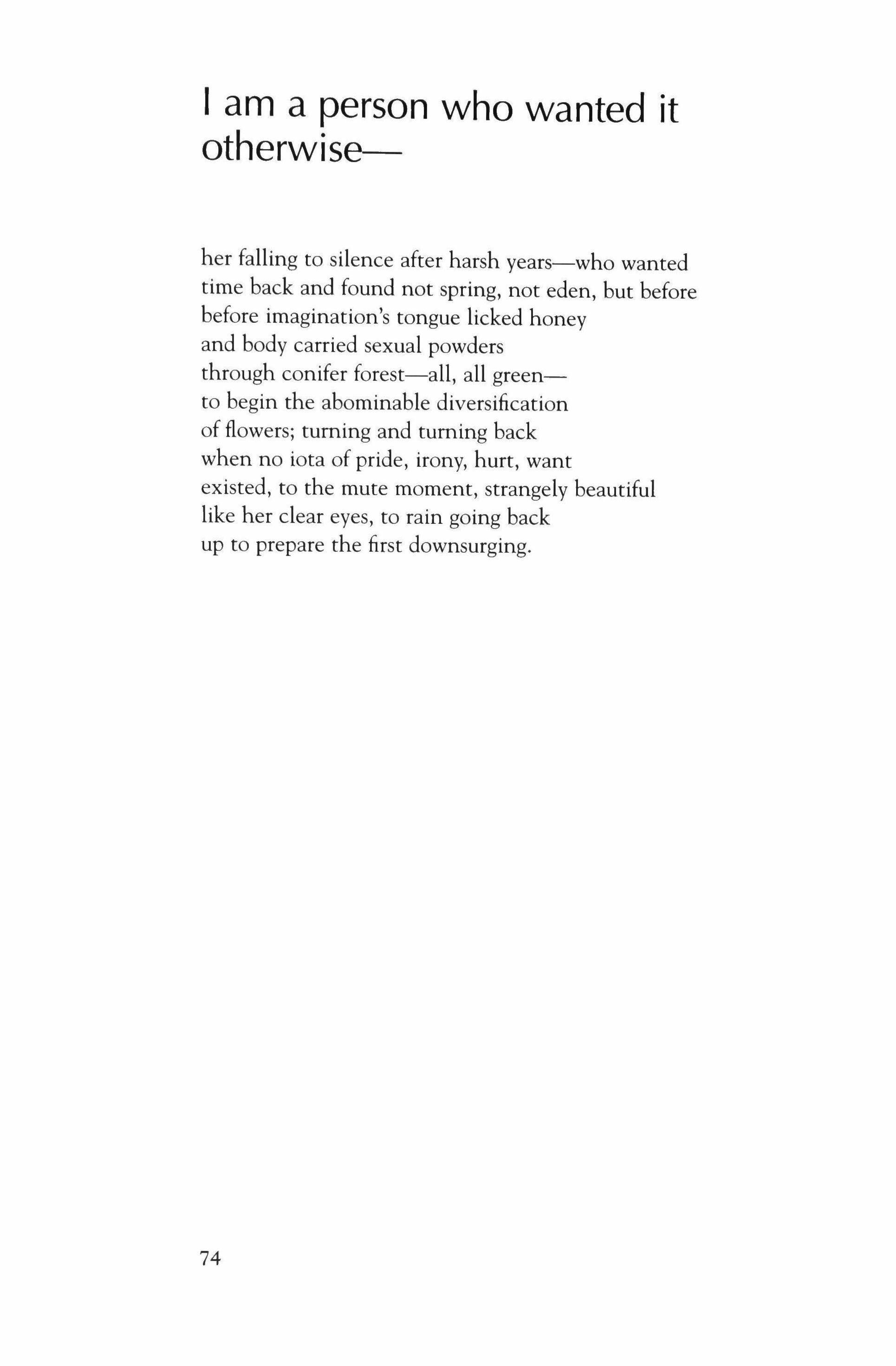
her falling to silence after harsh years-who wanted time back and found not spring, not eden, but before before imagination's tongue licked honey and body carried sexual powders through conifer forest-all, all greento begin the abominable diversification of flowers; turning and turning back when no iota of pride, irony, hurt, want existed, to the mute moment, strangely beautiful like her clear eyes, to rain going back up to prepare the first downsurging.
74
Why are we here who owns this house
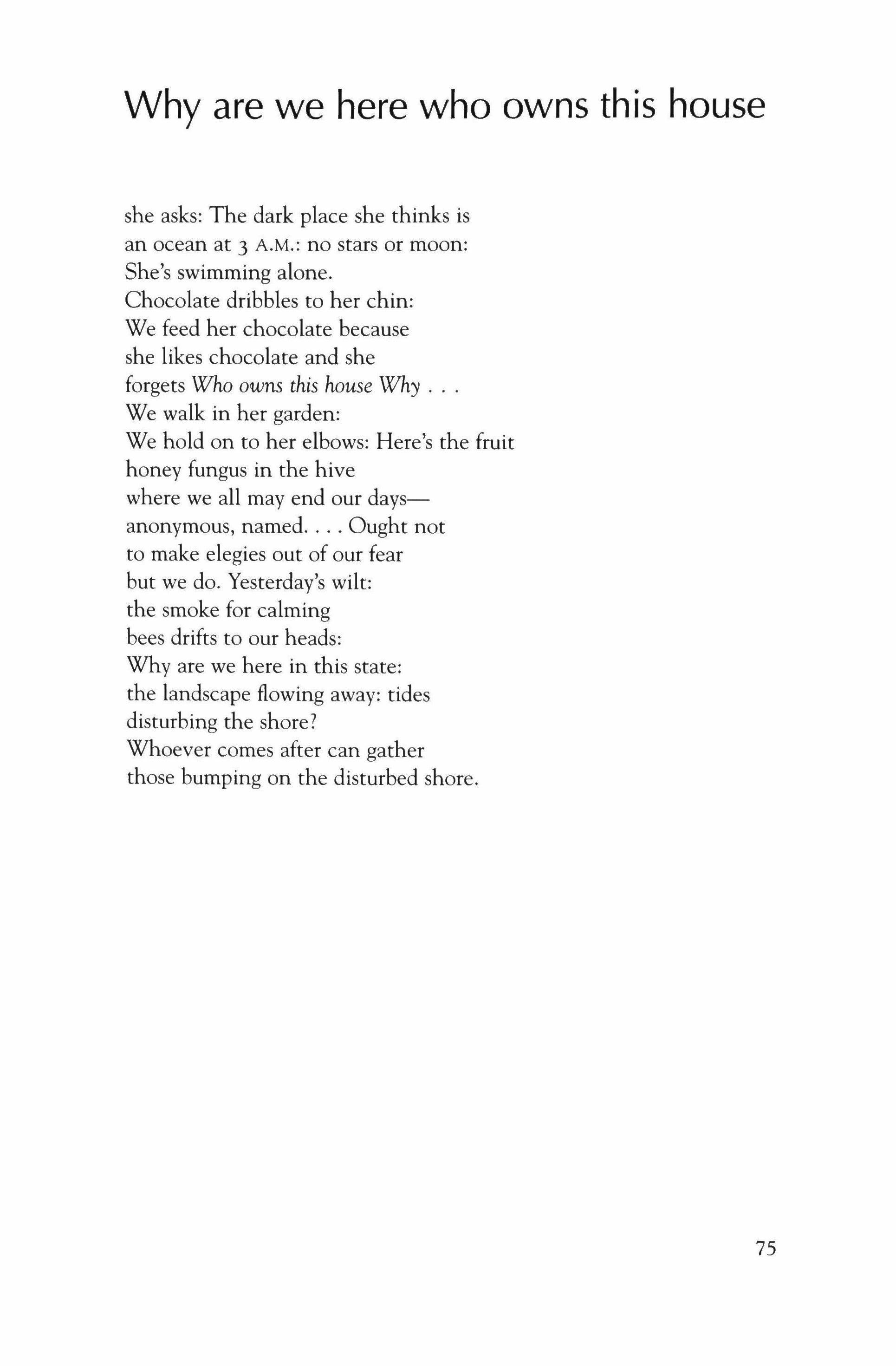
she asks: The dark place she thinks is an ocean at 3 A.M.: no stars or moon: She's swimming alone.
Chocolate dribbles to her chin: We feed her chocolate because she likes chocolate and she forgets Who owns this house Why We walk in her garden: We hold on to her elbows: Here's the fruit honey fungus in the hive where we all may end our daysanonymous, named Ought not to make elegies out of our fear but we do. Yesterday's wilt: the smoke for calming bees drifts to our heads: Why are we here in this state: the landscape flowing away: tides disturbing the shore? Whoever comes after can gather those bumping on the disturbed shore.
75
The mind's trick mirror has made of every glimmer
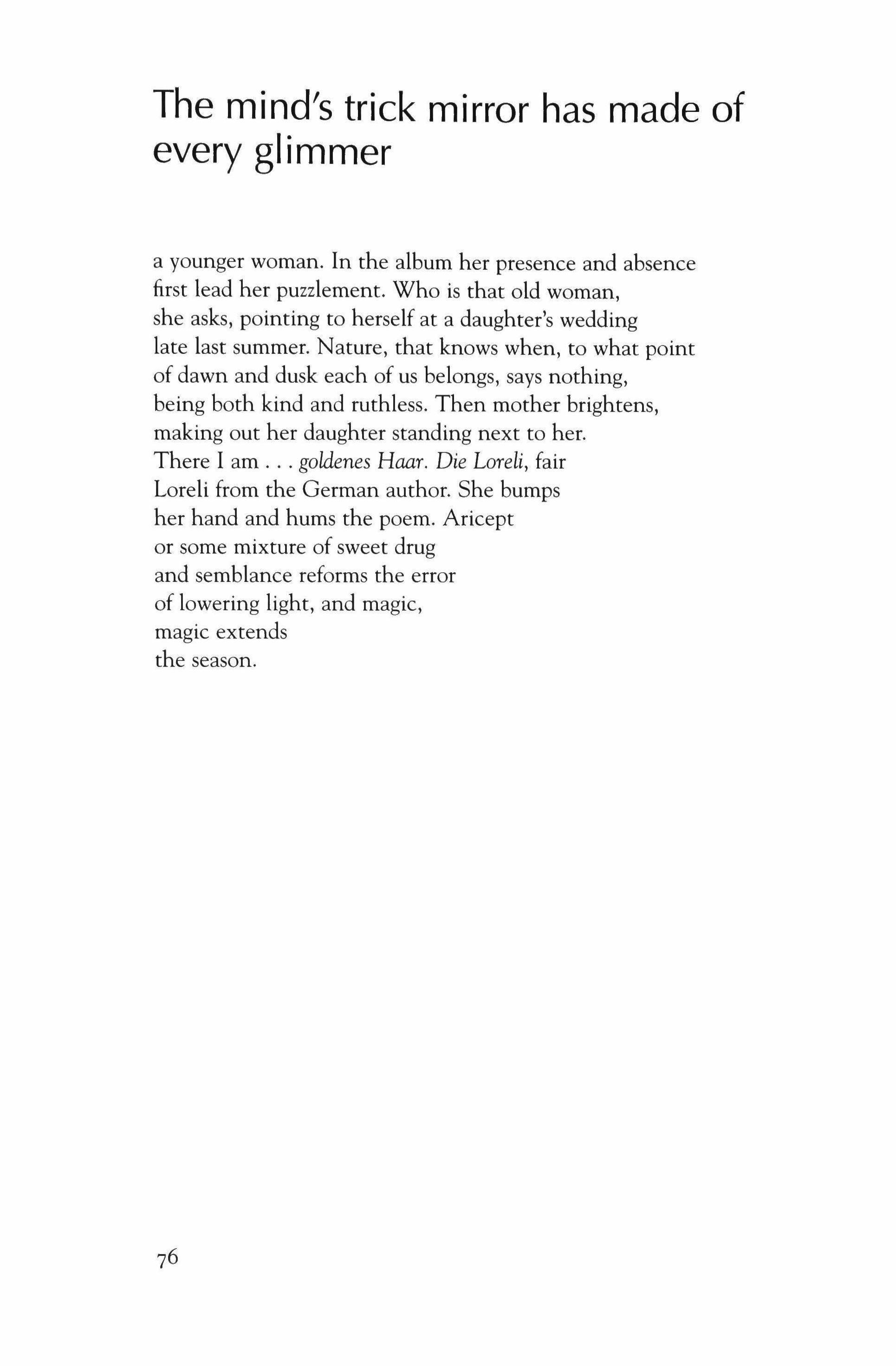
a younger woman. In the album her presence and absence first lead her puzzlement. Who is that old woman, she asks, pointing to herself at a daughter's wedding late last summer. Nature, that knows when, to what point of dawn and dusk each of us belongs, says nothing, being both kind and ruthless. Then mother brightens, making out her daughter standing next to her. There I am goldenes Haar. Die Loreli, fair Loreli from the German author. She bumps her hand and hums the poem. Aricept or some mixture of sweet drug and semblance reforms the error of lowering light, and magic, magic extends the season.
Tom Wayman
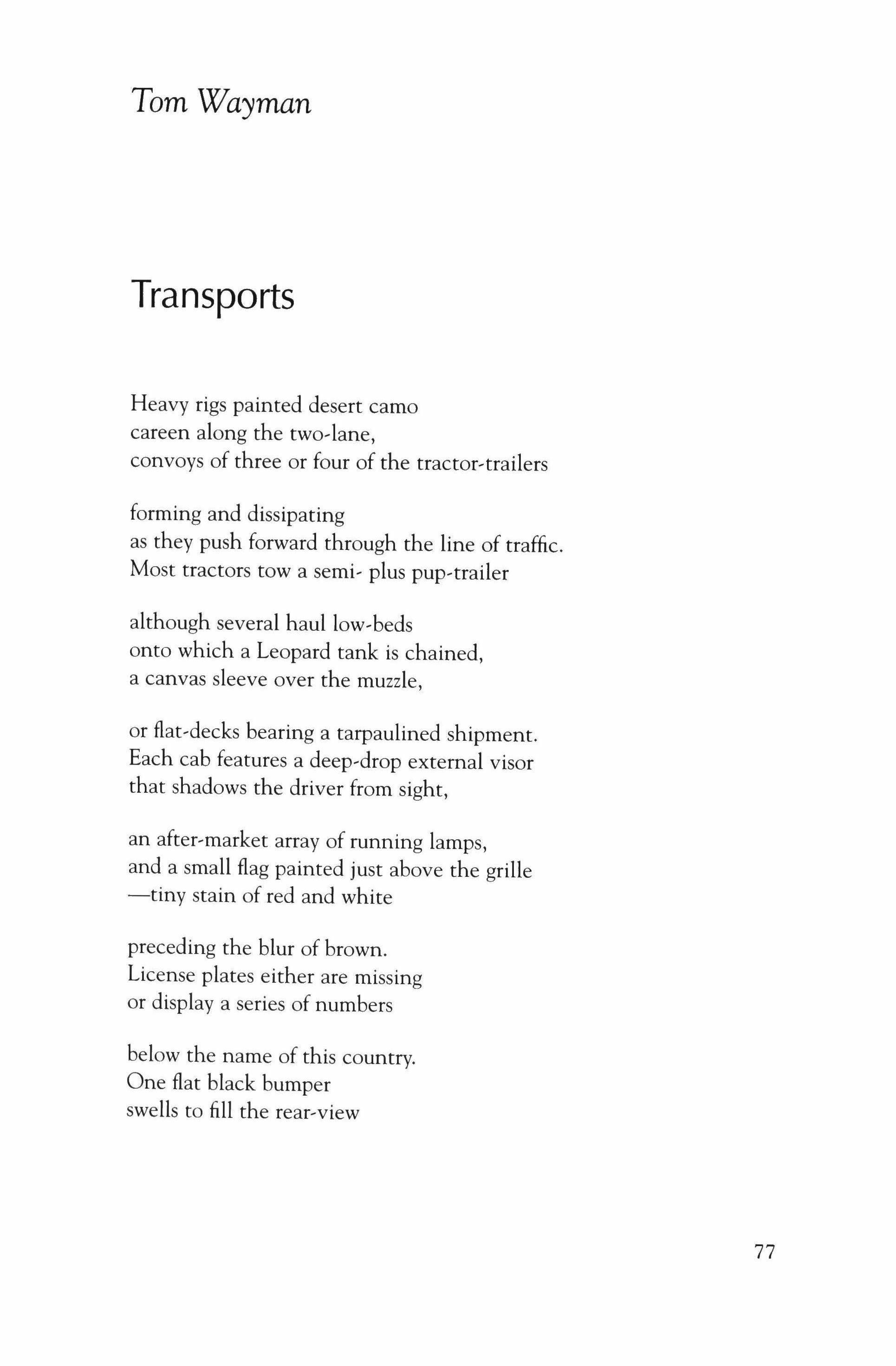
Transports
Heavy rigs painted desert camo careen along the two-lane, convoys of three or four of the tractor-trailers
forming and dissipating as they push forward through the line of traffic. Most tractors tow a semi- plus pup-trailer although several haul low-beds onto which a Leopard tank is chained, a canvas sleeve over the muzzle, or flat-decks bearing a tarpaulined shipment. Each cab features a deep-drop external visor that shadows the driver from sight, an after-market array of running lamps, and a small flag painted just above the grille -tiny stain of red and white
preceding the blur of brown. License plates either are missing or display a series of numbers below the name of this country. One flat black bumper swells to fill the rear-view
77
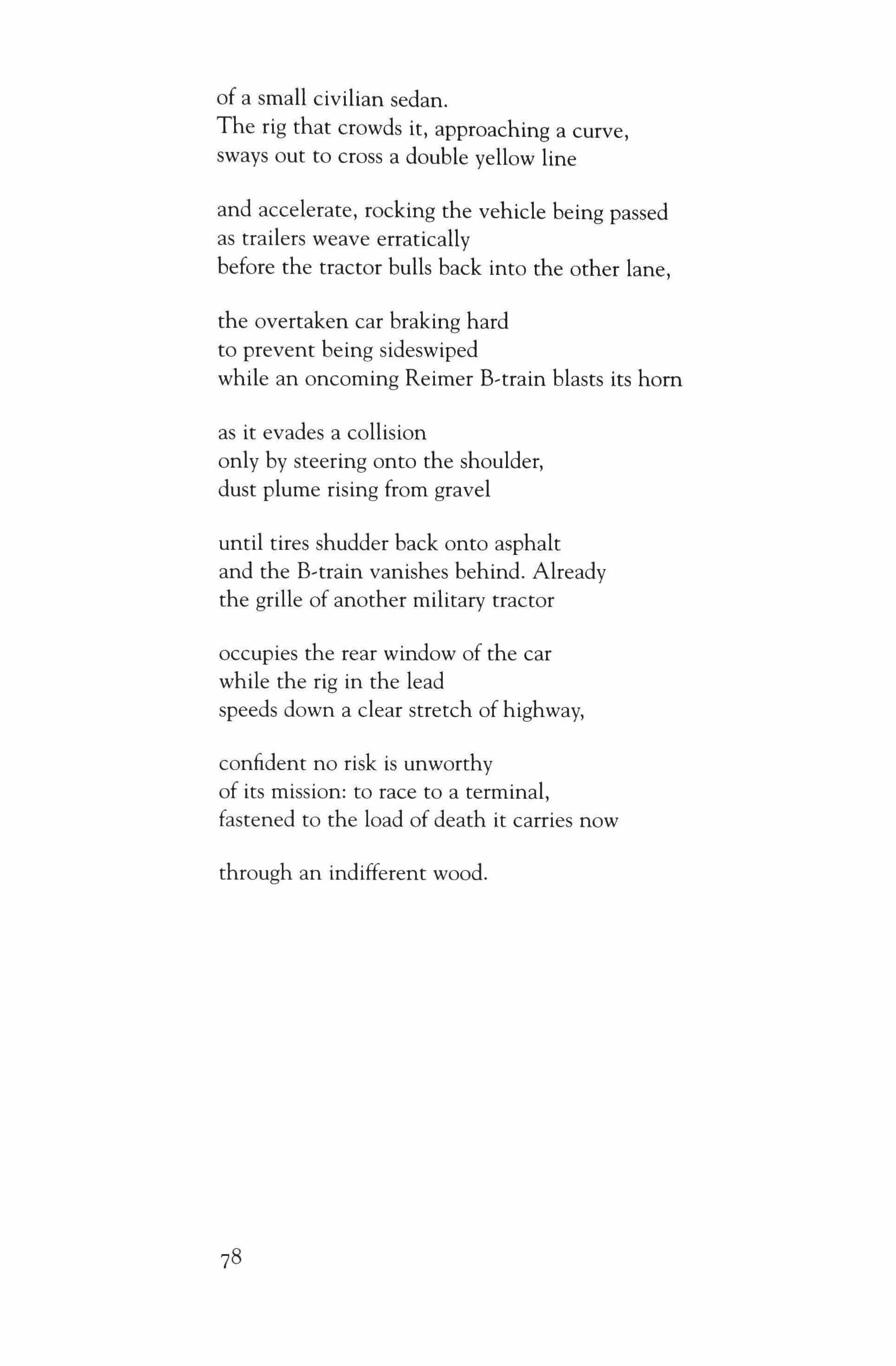
of a small civilian sedan. The rig that crowds it, approaching a curve, sways out to cross a double yellow line and accelerate, rocking the vehicle being passed as trailers weave erratically before the tractor bulls back into the other lane, the overtaken car braking hard to prevent being sideswiped while an oncoming Reimer Bvrrain blasts its hom
as it evades a collision only by steering onto the shoulder, dust plume rising from gravel until tires shudder back onto asphalt and the Bvtrain vanishes behind. Already the grille of another military tractor occupies the rear window of the car while the rig in the lead speeds down a clear stretch of highway,
confident no risk is unworthy of its mission: to race to a terminal, fastened to the load of death it carries now through an indifferent wood.
Viet Thanh Nguyen
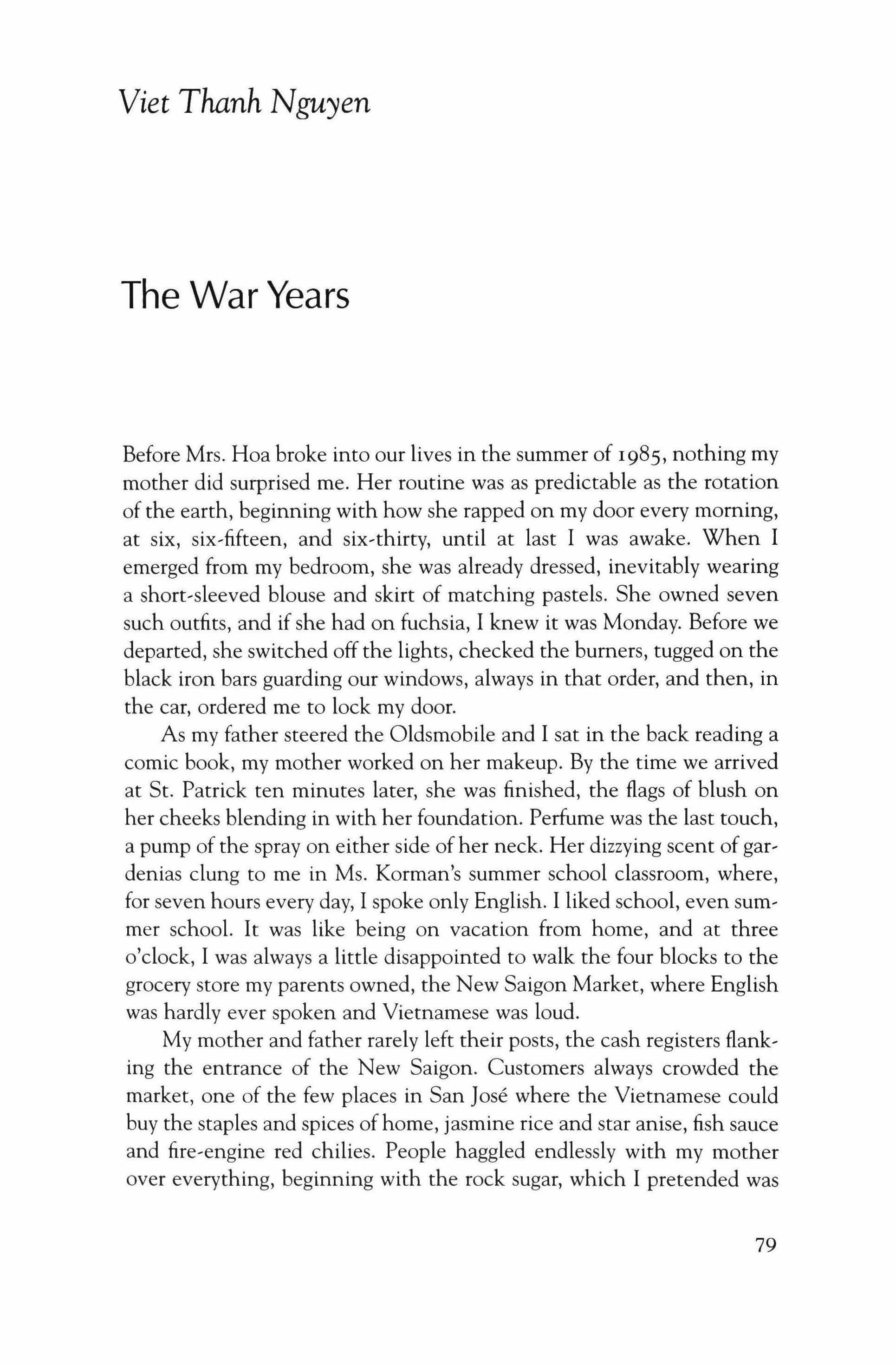
The
War Years
Before Mrs. Hoa broke into our lives in the summer of 1985, nothing my mother did surprised me. Her routine was as predictable as the rotation of the earth, beginning with how she rapped on my door every morning, at six, six-fifteen, and six-thirty, until at last I was awake. When I emerged from my bedroom, she was already dressed, inevitably wearing a short-sleeved blouse and skirt of matching pastels. She owned seven such outfits, and if she had on fuchsia, I knew it was Monday. Before we departed, she switched off the lights, checked the burners, tugged on the black iron bars guarding our windows, always in that order, and then, in the car, ordered me to lock my door.
As my father steered the Oldsmobile and I sat in the back reading a comic book, my mother worked on her makeup. By the time we arrived at St. Patrick ten minutes later, she was finished, the flags of blush on her cheeks blending in with her foundation. Perfume was the last touch, a pump of the spray on either side ofher neck. Her dizzying scent of gardenias clung to me in Ms. Korman's summer school classroom, where, for seven hours every day, I spoke only English. I liked school, even summer school. It was like being on vacation from home, and at three o'clock, I was always a little disappointed to walk the four blocks to the grocery store my parents owned, the New Saigon Market, where English was hardly ever spoken and Vietnamese was loud.
My mother and father rarely left their posts, the cash registers flanking the entrance of the New Saigon. Customers always crowded the market, one of the few places in San Jose where the Vietnamese could buy the staples and spices ofhome, jasmine rice and star anise, fish sauce and fire-engine red chilies. People haggled endlessly with my mother over everything, beginning with the rock sugar, which I pretended was
79
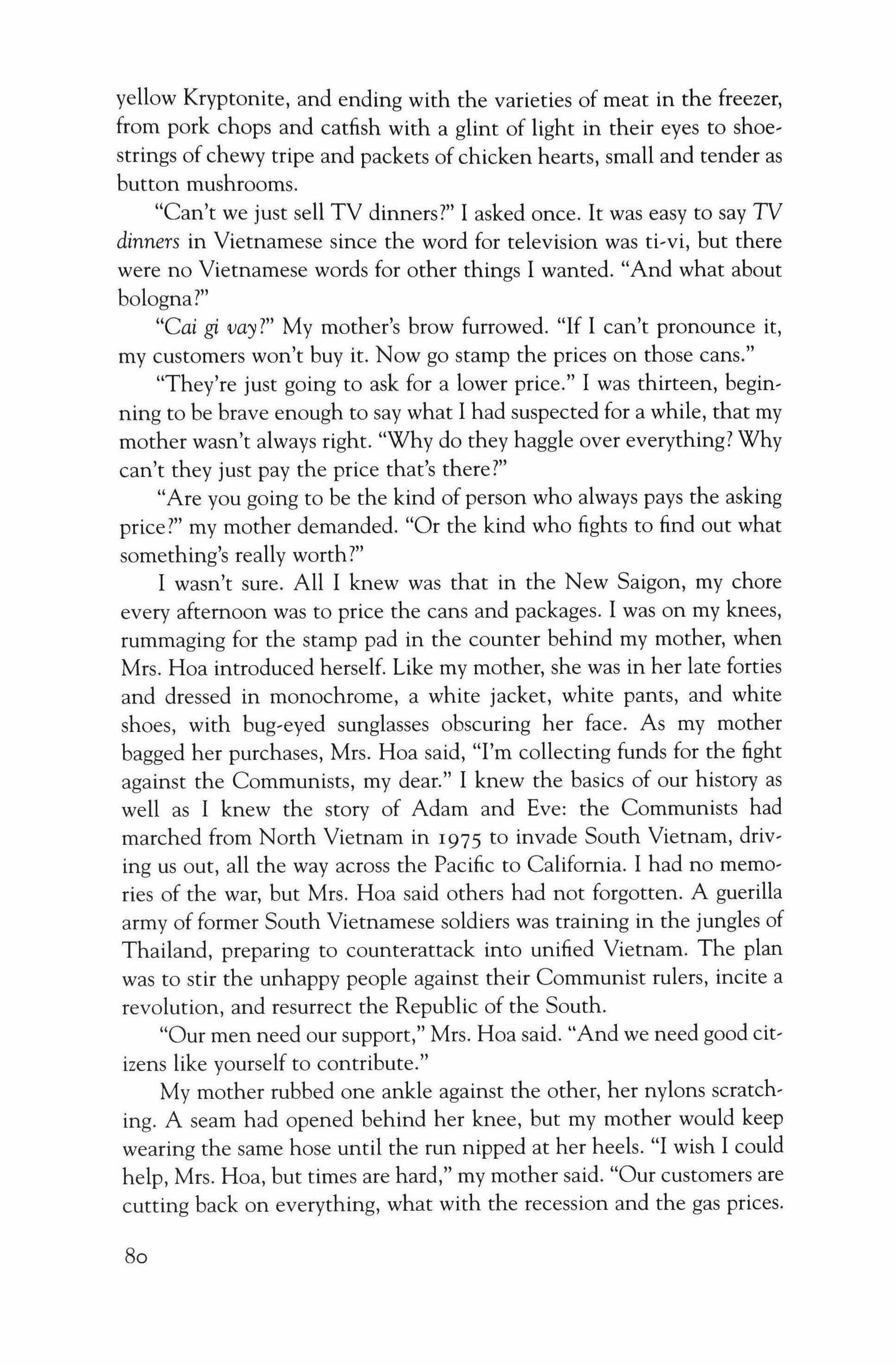
yellow Kryptonite, and ending with the varieties of meat in the freezer, from pork chops and catfish with a glint of light in their eyes to shoe, strings of chewy tripe and packets of chicken hearts, small and tender as button mushrooms.
"Can't we just sell TV dinners?" I asked once. It was easy to say TV dinners in Vietnamese since the word for television was ti-vi, but there were no Vietnamese words for other things I wanted. "And what about bologna?"
"Cai gi vay?" My mother's brow furrowed. "If I can't pronounce it, my customers won't buy it. Now go stamp the prices on those cans."
"They're just going to ask for a lower price." I was thirteen, begin, ning to be brave enough to say what I had suspected for a while, that my mother wasn't always right. "Why do they haggle over everything? Why can't they just pay the price that's there?"
"Are you going to be the kind of person who always pays the asking price?" my mother demanded. "Or the kind who fights to find out what something's really worth?"
I wasn't sure. All I knew was that in the New Saigon, my chore every afternoon was to price the cans and packages. I was on my knees, rummaging for the stamp pad in the counter behind my mother, when Mrs. Hoa introduced herself. Like my mother, she was in her late forties and dressed in monochrome, a white jacket, white pants, and white shoes, with bug-eyed sunglasses obscuring her face. As my mother bagged her purchases, Mrs. Hoa said, "I'm collecting funds for the fight against the Communists, my dear." I knew the basics of our history as well as I knew the story of Adam and Eve: the Communists had marched from North Vietnam in 1975 to invade South Vietnam, driving us out, all the way across the Pacific to California. I had no memo' ries of the war, but Mrs. Hoa said others had not forgotten. A guerilla army of former South Vietnamese soldiers was training in the jungles of Thailand, preparing to counterattack into unified Vietnam. The plan was to stir the unhappy people against their Communist rulers, incite a revolution, and resurrect the Republic of the South.
"Our men need our support," Mrs. Hoa said. "And we need good cit, izens like yourself to contribute."
My mother rubbed one ankle against the other, her nylons scratch, ing. A seam had opened behind her knee, but my mother would keep wearing the same hose until the run nipped at her heels. "I wish I could help, Mrs. Hoa, but times are hard," my mother said. "Our customers are cutting back on everything, what with the recession and the gas prices.
80
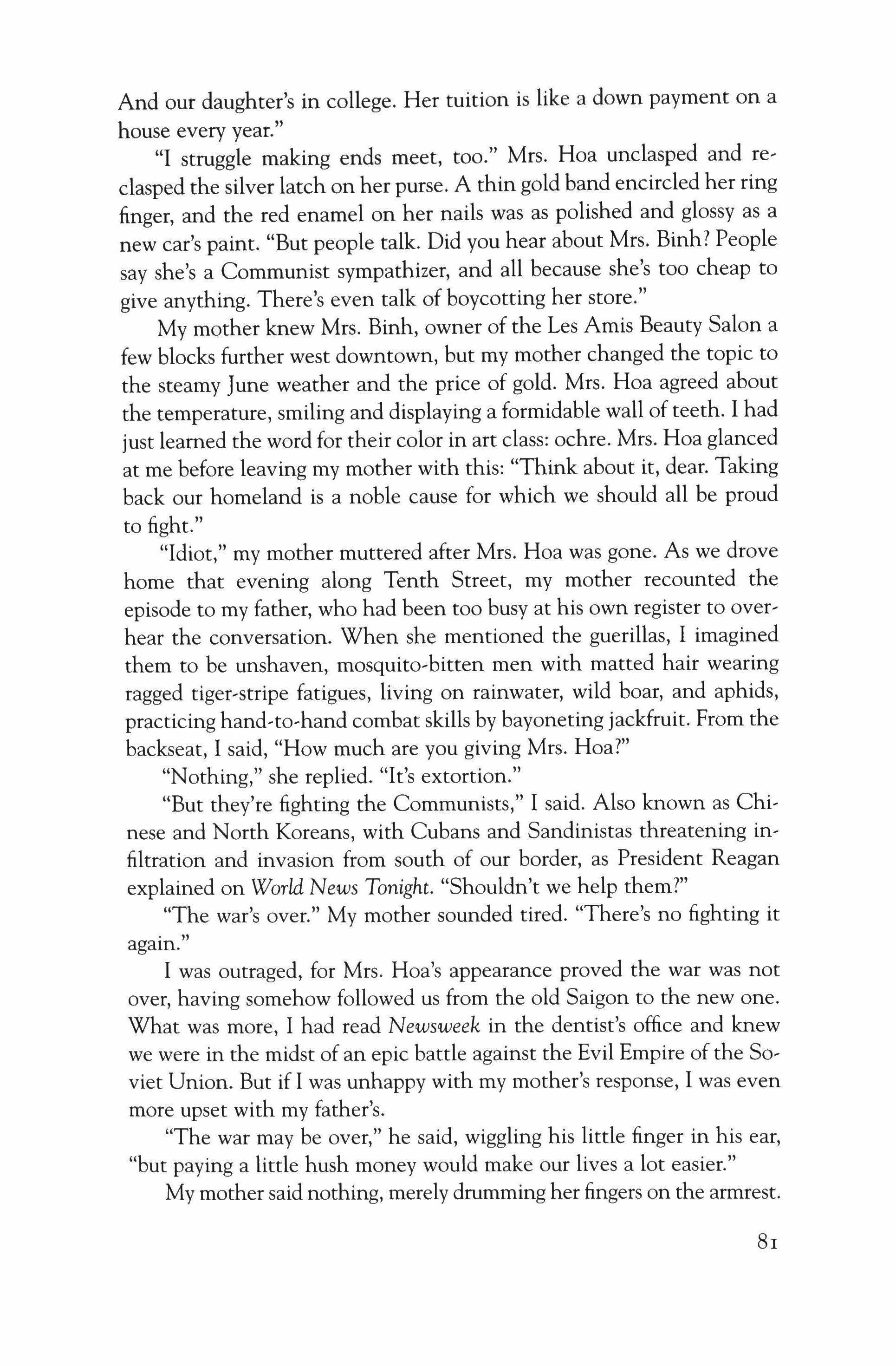
And our daughter's in college. Her tuition is like a down payment on a house every year."
"I struggle making ends meet, too." Mrs. Hoa unclasped and reclasped the silver latch on her purse. A thin gold band encircled her ring finger, and the red enamel on her nails was as polished and glossy as a new car's paint. "But people talk. Did you hear about Mrs. Binh? People say she's a Communist sympathizer, and all because she's too cheap to give anything. There's even talk of boycotting her store."
My mother knew Mrs. Binh, owner of the Les Amis Beauty Salon a few blocks further west downtown, but my mother changed the topic to the steamy June weather and the price of gold. Mrs. Hoa agreed about the temperature, smiling and displaying a formidable wall of teeth. I had just learned the word for their color in art class: ochre. Mrs. Hoa glanced at me before leaving my mother with this: "Think about it, dear. Taking back our homeland is a noble cause for which we should all be proud to fight."
"Idiot," my mother muttered after Mrs. Hoa was gone. As we drove home that evening along Tenth Street, my mother recounted the episode to my father, who had been too busy at his own register to over, hear the conversation. When she mentioned the guerillas, I imagined them to be unshaven, mosquito-bitten men with matted hair wearing ragged tiger,stripe fatigues, living on rainwater, wild boar, and aphids, practicing hand-to-hand combat skills by bayoneting jackfruit. From the backseat, I said, "How much are you giving Mrs. Hoa?"
"Nothing," she replied. "It's extortion."
"But they're fighting the Communists," I said. Also known as Chi, nese and North Koreans, with Cubans and Sandinistas threatening infiltration and invasion from south of our border, as President Reagan explained on World News Tonight. "Shouldn't we help them?"
"The war's over." My mother sounded tired. "There's no fighting it again."
I was outraged, for Mrs. Hoa's appearance proved the war was not over, having somehow followed us from the old Saigon to the new one. What was more, I had read Newsweek in the dentist's office and knew we were in the midst of an epic battle against the Evil Empire of the Soviet Union. But if I was unhappy with my mother's response, I was even more upset with my father's.
"The war may be over," he said, wiggling his little finger in his ear, "but paying a little hush money would make our lives a lot easier."
My mother said nothing, merely drumming her fingers on the armrest.
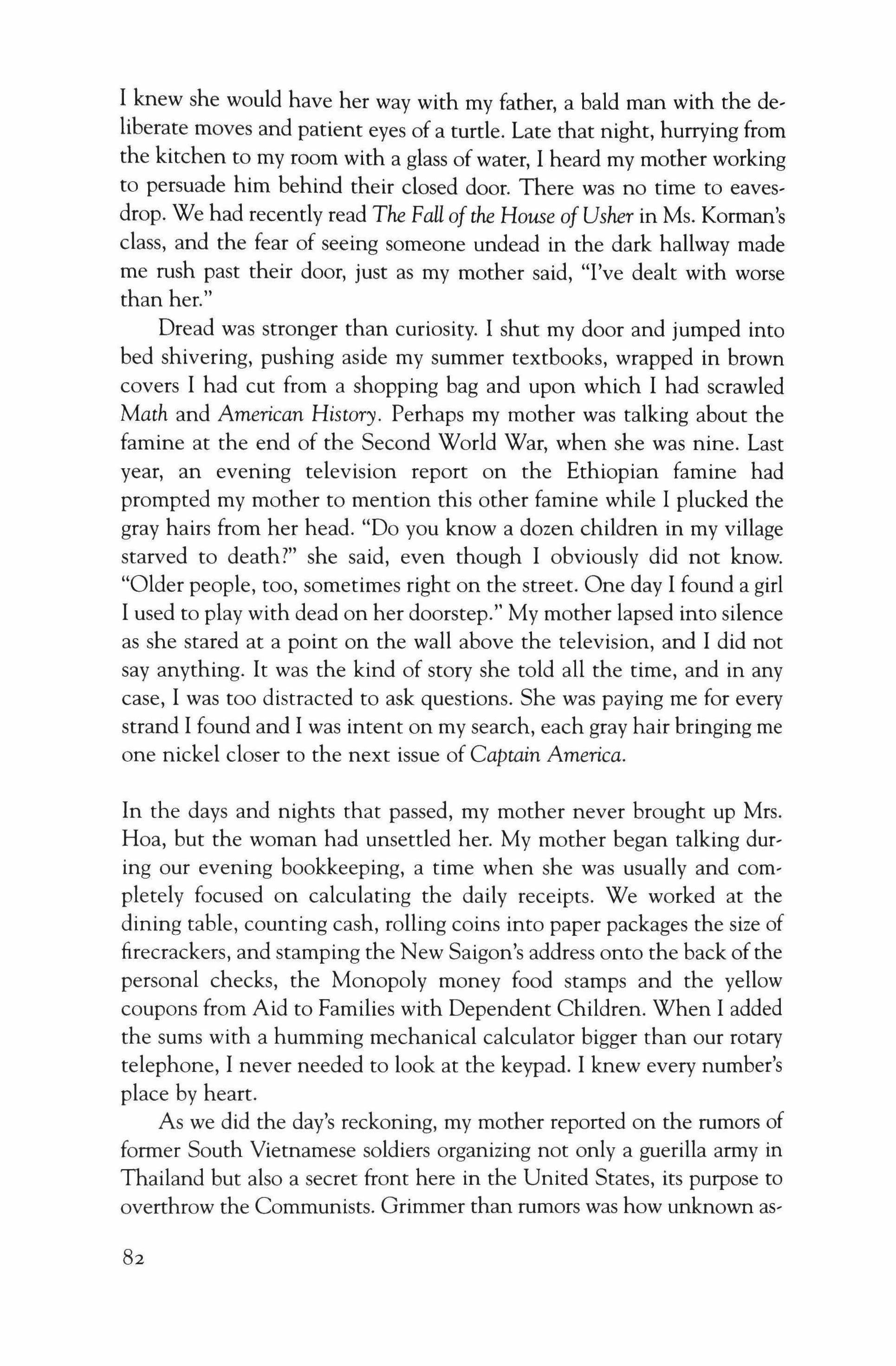
I knew she would have her way with my father, a bald man with the de, liberate moves and patient eyes of a turtle. Late that night, hurrying from the kitchen to my room with a glass of water, I heard my mother working to persuade him behind their closed door. There was no time to eaves, drop. We had recently read The Fall of the House of Usher in Ms. Korman's class, and the fear of seeing someone undead in the dark hallway made me rush past their door, just as my mother said, "I've dealt with worse than her."
Dread was stronger than curiosity. I shut my door and jumped into bed shivering, pushing aside my summer textbooks, wrapped in brown covers I had cut from a shopping bag and upon which I had scrawled Math and American History. Perhaps my mother was talking about the famine at the end of the Second World War, when she was nine. Last year, an evening television report on the Ethiopian famine had prompted my mother to mention this other famine while I plucked the gray hairs from her head. "Do you know a dozen children in my village starved to death?" she said, even though I obviously did not know. "Older people, too, sometimes right on the street. One day I found a girl I used to play with dead on her doorstep." My mother lapsed into silence as she stared at a point on the wall above the television, and I did not say anything. It was the kind of story she told all the time, and in any case, I was too distracted to ask questions. She was paying me for every strand I found and I was intent on my search, each gray hair bringing me one nickel closer to the next issue of Captain America.
In the days and nights that passed, my mother never brought up Mrs. Hoa, but the woman had unsettled her. My mother began talking during our evening bookkeeping, a time when she was usually and com, pletely focused on calculating the daily receipts. We worked at the dining table, counting cash, rolling coins into paper packages the size of firecrackers, and stamping the New Saigon's address onto the back ofthe personal checks, the Monopoly money food stamps and the yellow coupons from Aid to Families with Dependent Children. When I added the sums with a humming mechanical calculator bigger than our rotary telephone, I never needed to look at the keypad. I knew every number's place by heart.
As we did the day's reckoning, my mother reported on the rumors of former South Vietnamese soldiers organizing not only a guerilla army in Thailand but also a secret front here in the United States, its purpose to overthrow the Communists. Grimmer than rumors was how unknown as'
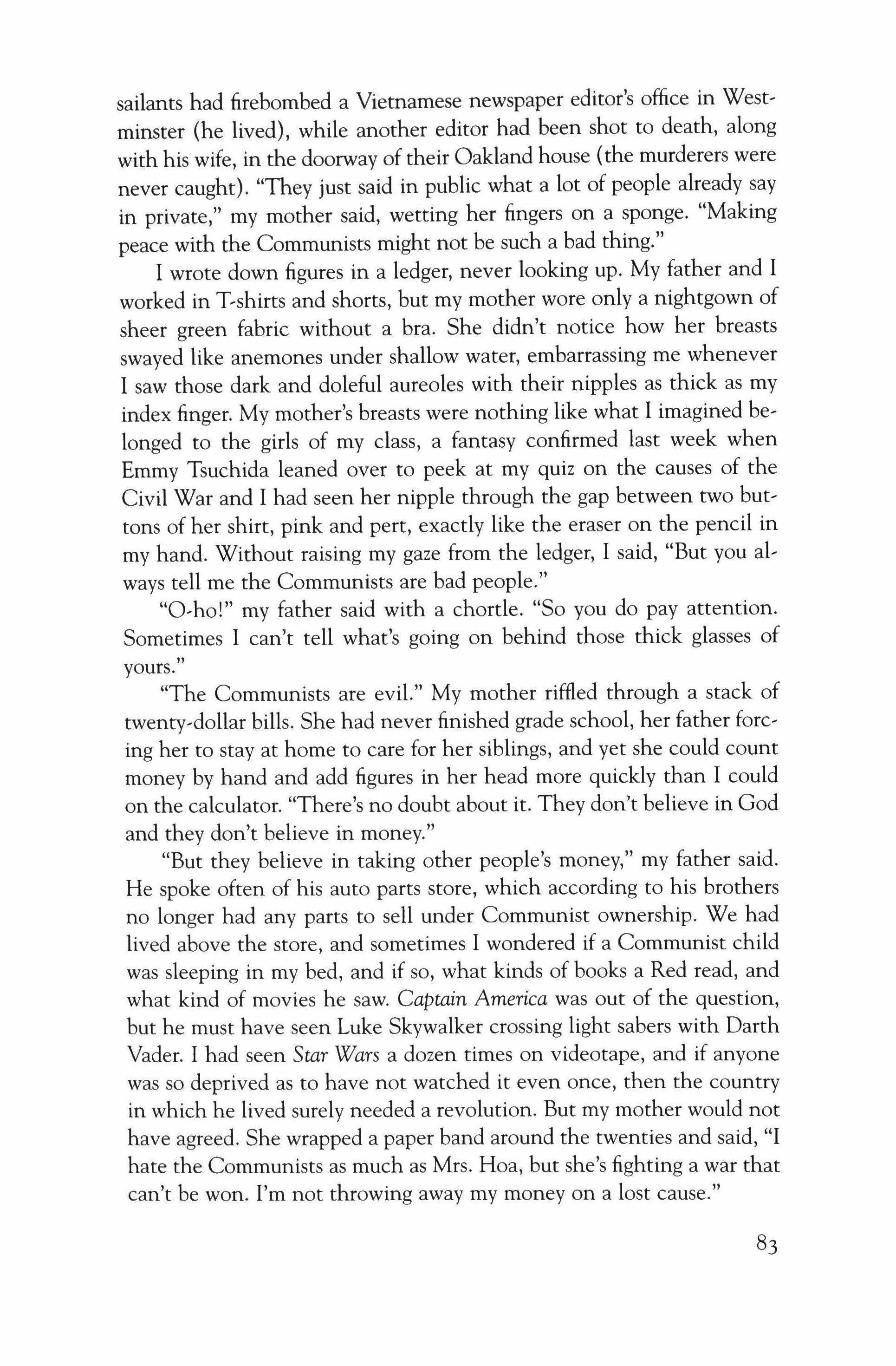
sailants had firebombed a Vietnamese newspaper editor's office in West, minster (he lived), while another editor had been shot to death, along with his wife, in the doorway of their Oakland house (the murderers were never caught). "They just said in public what a lot of people already say in private," my mother said, wetting her fingers on a sponge. "Making peace with the Communists might not be such a bad thing."
I wrote down figures in a ledger, never looking up. My father and I worked in 'Tshirts and shorts, but my mother wore only a nightgown of sheer green fabric without a bra. She didn't notice how her breasts swayed like anemones under shallow water, embarrassing me whenever I saw those dark and doleful aureoles with their nipples as thick as my index finger. My mother's breasts were nothing like what I imagined be, longed to the girls of my class, a fantasy confirmed last week when Emmy Tsuchida leaned over to peek at my quiz on the causes of the Civil War and I had seen her nipple through the gap between two but, tons of her shirt, pink and pert, exactly like the eraser on the pencil in my hand. Without raising my gaze from the ledger, I said, "But you always tell me the Communists are bad people."
"Ovho!" my father said with a chortle. "So you do pay attention. Sometimes I can't tell what's going on behind those thick glasses of yours."
"The Communists are evil." My mother riffled through a stack of twenty,dollar bills. She had never finished grade school, her father fore, ing her to stay at home to care for her siblings, and yet she could count money by hand and add figures in her head more quickly than I could on the calculator. "There's no doubt about it. They don't believe in God and they don't believe in money."
"But they believe in taking other people's money," my father said. He spoke often of his auto parts store, which according to his brothers no longer had any parts to sell under Communist ownership. We had lived above the store, and sometimes I wondered if a Communist child was sleeping in my bed, and if so, what kinds of books a Red read, and what kind of movies he saw. Captain America was out of the question, but he must have seen Luke Skywalker crossing light sabers with Darth Vader. I had seen Star Wars a dozen times on videotape, and if anyone was so deprived as to have not watched it even once, then the country in which he lived surely needed a revolution. But my mother would not have agreed. She wrapped a paper band around the twenties and said, "I hate the Communists as much as Mrs. Hoa, but she's fighting a war that can't be won. I'm not throwing away my money on a lost cause."
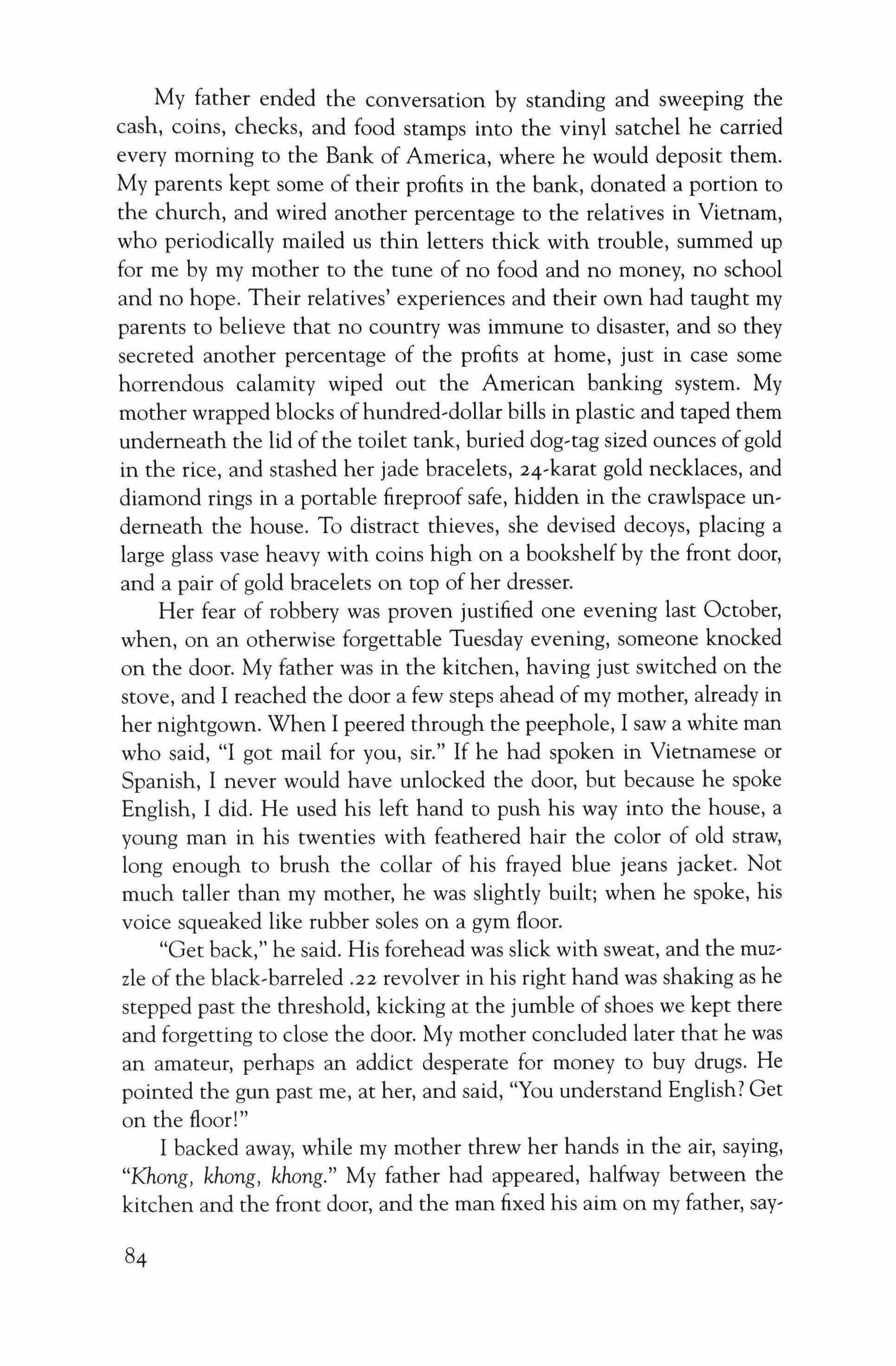
My father ended the conversation by standing and sweeping the cash, coins, checks, and food stamps into the vinyl satchel he carried every morning to the Bank of America, where he would deposit them. My parents kept some of their profits in the bank, donated a portion to the church, and wired another percentage to the relatives in Vietnam, who periodically mailed us thin letters thick with trouble, summed up for me by my mother to the tune of no food and no money, no school and no hope. Their relatives' experiences and their own had taught my parents to believe that no country was immune to disaster, and so they secreted another percentage of the profits at home, just in case some horrendous calamity wiped out the American banking system. My mother wrapped blocks ofhundred-dollar bills in plastic and taped them underneath the lid of the toilet tank, buried dog-tag sized ounces ofgold in the rice, and stashed her jade bracelets, 24�karat gold necklaces, and diamond rings in a portable fireproof safe, hidden in the crawlspace underneath the house. To distract thieves, she devised decoys, placing a large glass vase heavy with coins high on a bookshelf by the front door, and a pair of gold bracelets on top of her dresser.
Her fear of robbery was proven justified one evening last October, when, on an otherwise forgettable Tuesday evening, someone knocked on the door. My father was in the kitchen, having just switched on the stove, and I reached the door a few steps ahead of my mother, already in her nightgown. When I peered through the peephole, I saw a white man who said, "I got mail for you, sir." If he had spoken in Vietnamese or Spanish, I never would have unlocked the door, but because he spoke English, I did. He used his left hand to push his way into the house, a young man in his twenties with feathered hair the color of old straw, long enough to brush the collar of his frayed blue jeans jacket. Not much taller than my mother, he was slightly built; when he spoke, his voice squeaked like rubber sales on a gym floor.
"Get back," he said. His forehead was slick with sweat, and the muzzle of the black-barreled .22 revolver in his right hand was shaking as he stepped past the threshold, kicking at the jumble of shoes we kept there and forgetting to close the door. My mother concluded later that he was an amateur, perhaps an addict desperate for money to buy drugs. He pointed the gun past me, at her, and said, "You understand English? Get on the floor!"
I backed away, while my mother threw her hands in the air, saying, "Khong, khong, khong." My father had appeared, halfway between the kitchen and the front door, and the man fixed his aim on my father, say-
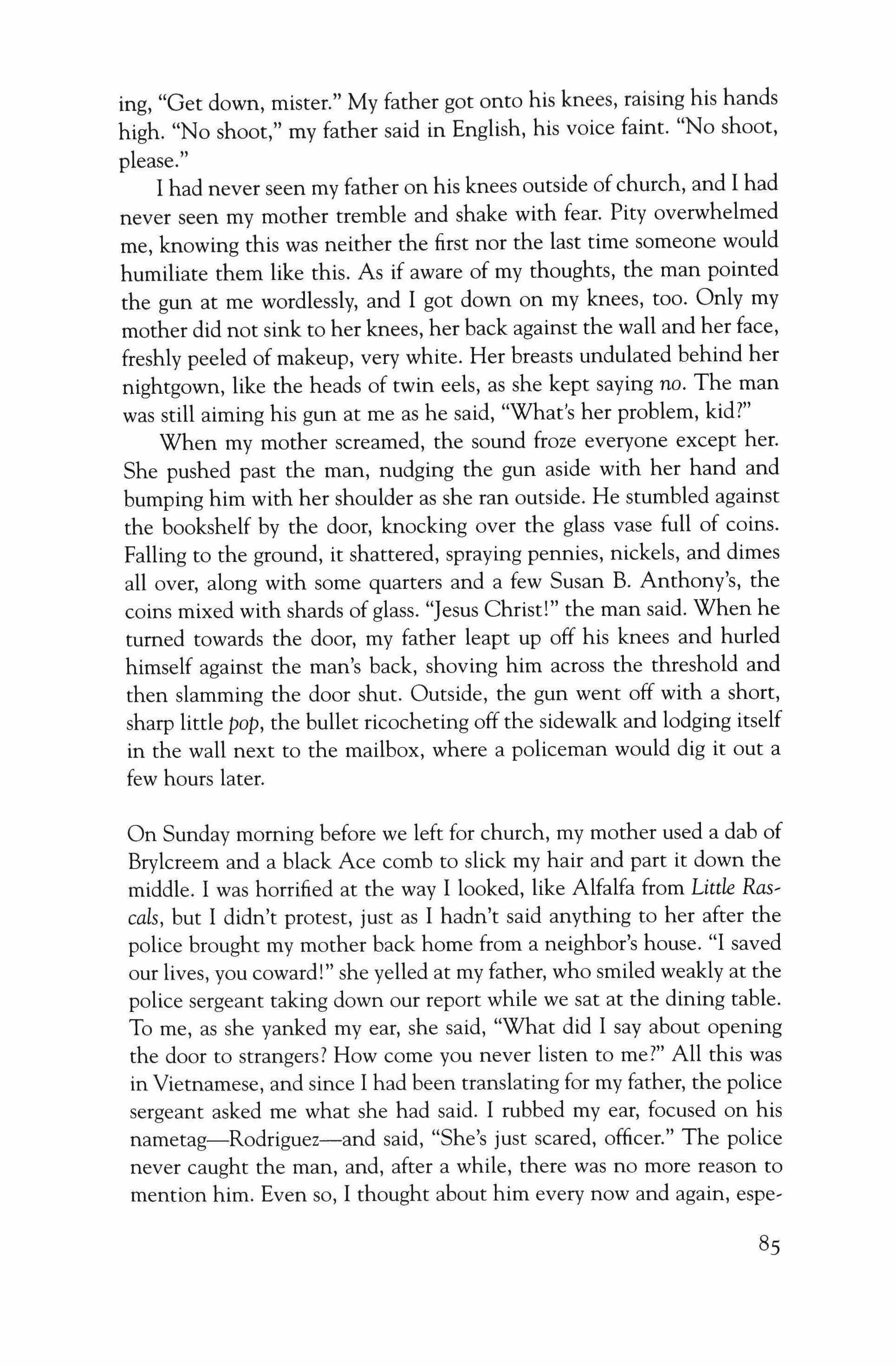
ing, "Get down, mister." My father got onto his knees, raising his hands high. "No shoot," my father said in English, his voice faint. "No shoot, please."
I had never seen my father on his knees outside of church, and I had never seen my mother tremble and shake with fear. Pity overwhelmed me, knowing this was neither the first nor the last time someone would humiliate them like this. As if aware of my thoughts, the man pointed the gun at me wordlessly, and I got down on my knees, too. Only my mother did not sink to her knees, her back against the wall and her face, freshly peeled of makeup, very white. Her breasts undulated behind her nightgown, like the heads of twin eels, as she kept saying no. The man was still aiming his gun at me as he said, "What's her problem, kid?" When my mother screamed, the sound froze everyone except her. She pushed past the man, nudging the gun aside with her hand and bumping him with her shoulder as she ran outside. He stumbled against the bookshelf by the door, knocking over the glass vase full of coins. Falling to the ground, it shattered, spraying pennies, nickels, and dimes all over, along with some quarters and a few Susan B. Anthony's, the coins mixed with shards of glass. "Jesus Christ!" the man said. When he turned towards the door, my father leapt up off his knees and hurled himself against the man's back, shoving him across the threshold and then slamming the door shut. Outside, the gun went off with a short, sharp little pop, the bullet ricocheting off the sidewalk and lodging itself in the wall next to the mailbox, where a policeman would dig it out a few hours later.
On Sunday morning before we left for church, my mother used a dab of Brylcreem and a black Ace comb to slick my hair and part it down the middle. I was horrified at the way I looked, like Alfalfa from Little Rascals, but I didn't protest, just as I hadn't said anything to her after the police brought my mother back home from a neighbor's house. "I saved our lives, you coward!" she yelled at my father, who smiled weakly at the police sergeant taking down our report while we sat at the dining table. To me, as she yanked my ear, she said, "What did I say about opening the door to strangers? How come you never listen to me?" All this was in Vietnamese, and since I had been translating for my father, the police sergeant asked me what she had said. I rubbed my ear, focused on his nametag-Rodriguez-and said, "She's just scared, officer." The police never caught the man, and, after a while, there was no more reason to mention him. Even so, I thought about him every now and again, espe-
85
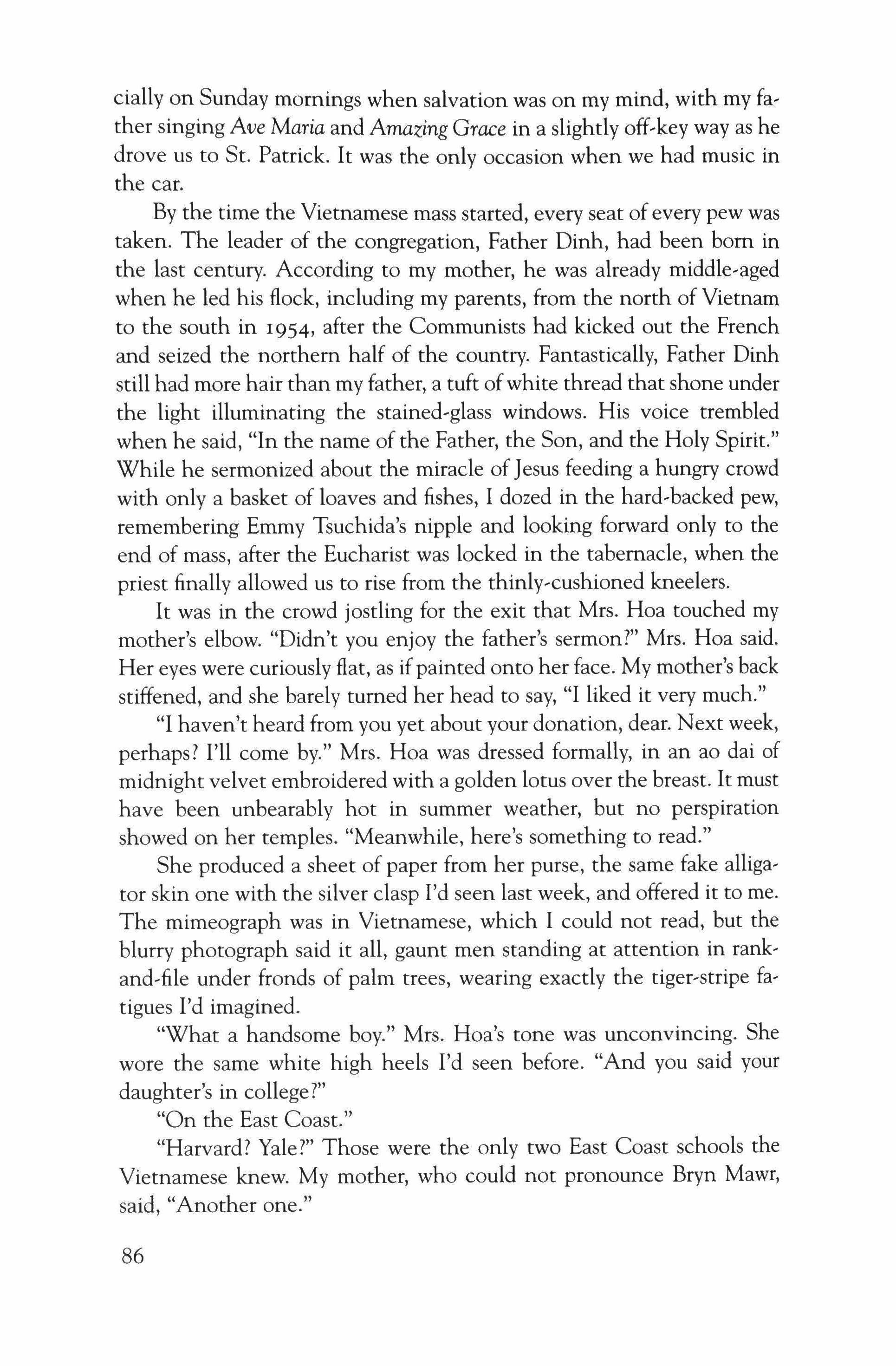
cially on Sunday mornings when salvation was on my mind, with my father singing Ave Maria and Amazing Grace in a slightly off-key way as he drove us to St. Patrick. It was the only occasion when we had music in the car.
By the time the Vietnamese mass started, every seat of every pew was taken. The leader of the congregation, Father Dinh, had been born in the last century. According to my mother, he was already middle-aged when he led his flock, including my parents, from the north of Vietnam to the south in 1954, after the Communists had kicked out the French and seized the northern half of the country. Fantastically, Father Dinh still had more hair than my father, a tuft ofwhite thread that shone under the light illuminating the stained-glass windows. His voice trembled when he said, "In the name of the Father, the Son, and the Holy Spirit." While he sermonized about the miracle of Jesus feeding a hungry crowd with only a basket of loaves and fishes, I dozed in the hard-backed pew, remembering Emmy Tsuchida's nipple and looking forward only to the end of mass, after the Eucharist was locked in the tabernacle, when the priest finally allowed us to rise from the thinly-cushioned kneelers.
It was in the crowd jostling for the exit that Mrs. Hoa touched my mother's elbow. "Didn't you enjoy the father's sermon?" Mrs. Hoa said. Her eyes were curiously flat, as ifpainted onto her face. My mother's back stiffened, and she barely turned her head to say, "I liked it very much."
"I haven't heard from you yet about your donation, dear. Next week, perhaps? I'll come by." Mrs. Hoa was dressed formally, in an ao dai of midnight velvet embroidered with a golden lotus over the breast. It must have been unbearably hot in summer weather, but no perspiration showed on her temples. "Meanwhile, here's something to read."
She produced a sheet of paper from her purse, the same fake alligator skin one with the silver clasp I'd seen last week, and offered it to me. The mimeograph was in Vietnamese, which I could not read, but the blurry photograph said it all, gaunt men standing at attention in rankand-file under fronds of palm trees, wearing exactly the tiger-stripe fatigues I'd imagined.
"What a handsome boy." Mrs. Hoa's tone was unconvincing. She wore the same white high heels I'd seen before. "And you said your daughter's in college?"
"On the East Coast."
"Harvard? Yale?" Those were the only two East Coast schools the Vietnamese knew. My mother, who could not pronounce Bryn Mawr, said, "Another one."
86
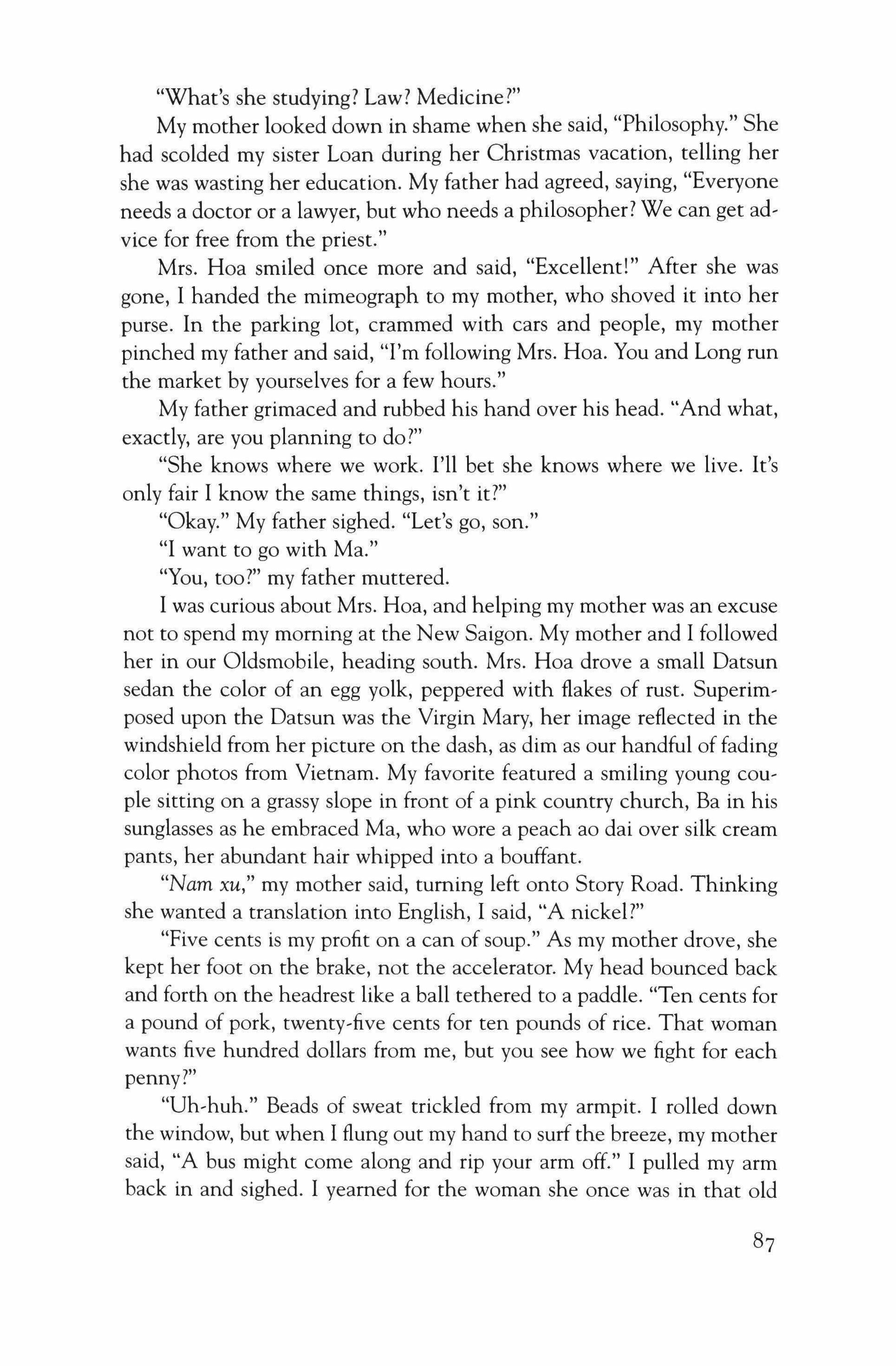
"What's she studying? Law? Medicine?"
My mother looked down in shame when she said, "Philosophy." She had scolded my sister Loan during her Christmas vacation, telling her she was wasting her education. My father had agreed, saying, "Everyone needs a doctor or a lawyer, but who needs a philosopher? We can get advice for free from the priest."
Mrs. Hoa smiled once more and said, "Excellent!" After she was gone, I handed the mimeograph to my mother, who shoved it into her purse. In the parking lot, crammed with cars and people, my mother pinched my father and said, "I'm following Mrs. Hoa. You and Long run the market by yourselves for a few hours."
My father grimaced and rubbed his hand over his head. "And what, exactly, are you planning to do?"
"She knows where we work. I'll bet she knows where we live. It's only fair I know the same things, isn't it?"
"Okay." My father sighed. "Let's go, son."
"I want to go with Ma."
"You, too?" my father muttered.
I was curious about Mrs. Hoa, and helping my mother was an excuse not to spend my morning at the New Saigon. My mother and I followed her in our Oldsmobile, heading south. Mrs. Hoa drove a small Datsun sedan the color of an egg yolk, peppered with flakes of rust. Superimposed upon the Datsun was the Virgin Mary, her image reflected in the windshield from her picture on the dash, as dim as our handful of fading color photos from Vietnam. My favorite featured a smiling young couple sitting on a grassy slope in front of a pink country church, Ba in his sunglasses as he embraced Ma, who wore a peach ao dai over silk cream pants, her abundant hair whipped into a bouffant.
"Nam xu," my mother said, turning left onto Story Road. Thinking she wanted a translation into English, I said, "A nickel?"
"Five cents is my profit on a can of soup." As my mother drove, she kept her foot on the brake, not the accelerator. My head bounced back and forth on the headrest like a ball tethered to a paddle. "Ten cents for a pound of pork, twenty-five cents for ten pounds of rice. That woman wants five hundred dollars from me, but you see how we fight for each penny?"
"Uh-huh." Beads of sweat trickled from my armpit. I rolled down the window, but when I flung out my hand to surf the breeze, my mother said, "A bus might come along and rip your arm off." I pulled my arm back in and sighed. I yearned for the woman she once was in that old
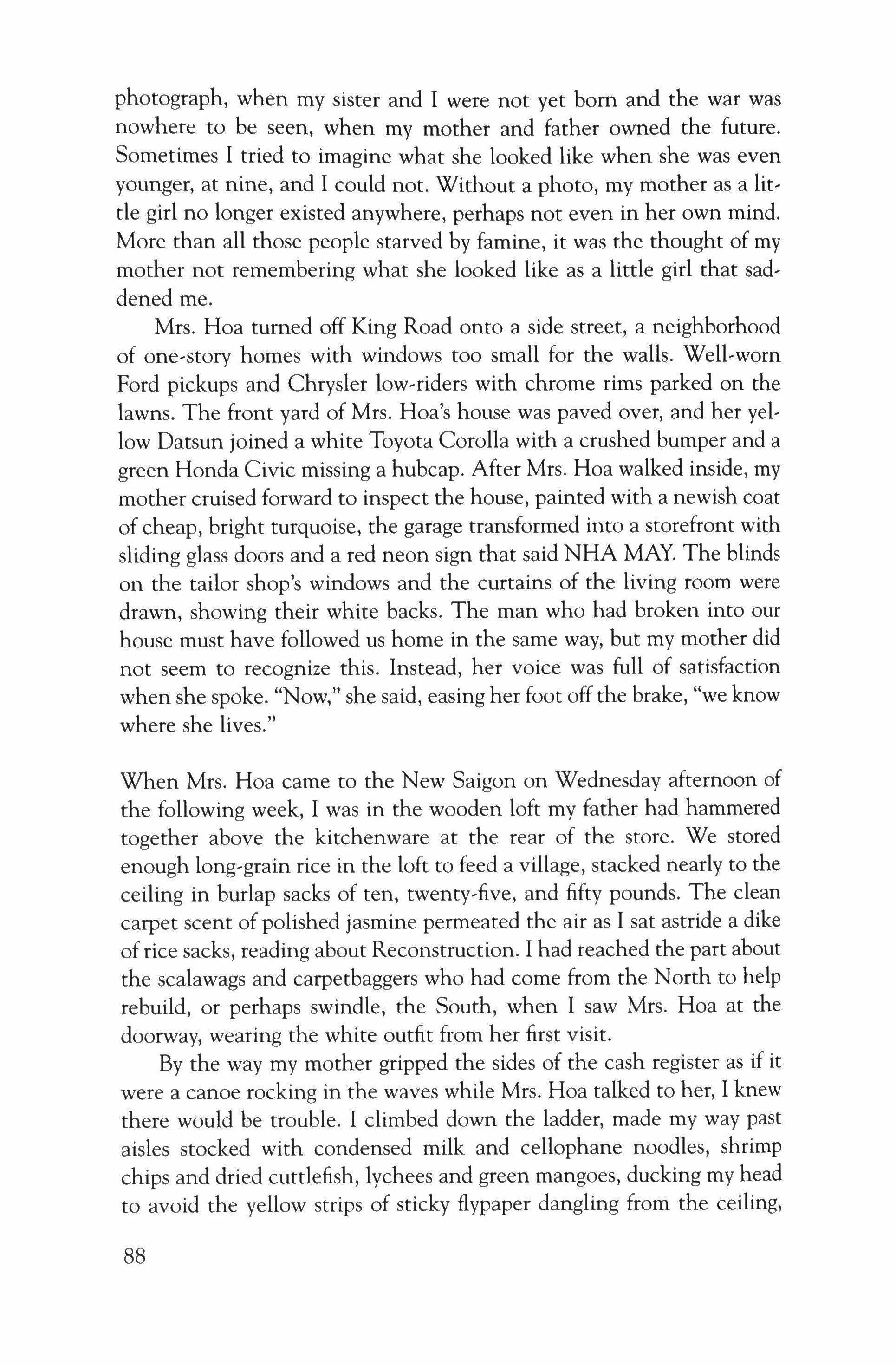
photograph, when my sister and I were not yet born and the war was nowhere to be seen, when my mother and father owned the future. Sometimes I tried to imagine what she looked like when she was even younger, at nine, and I could not. Without a photo, my mother as a little girl no longer existed anywhere, perhaps not even in her own mind. More than all those people starved by famine, it was the thought of my mother not remembering what she looked like as a little girl that saddened me.
Mrs. Hoa turned off King Road onto a side street, a neighborhood of one-story homes with windows too small for the walls. Well-worn Ford pickups and Chrysler low-riders with chrome rims parked on the lawns. The front yard of Mrs. Hoa's house was paved over, and her yellow Datsun joined a white Toyota Corolla with a crushed bumper and a green Honda Civic missing a hubcap. After Mrs. Hoa walked inside, my mother cruised forward to inspect the house, painted with a newish coat of cheap, bright turquoise, the garage transformed into a storefront with sliding glass doors and a red neon sign that said NHA MAY. The blinds on the tailor shop's windows and the curtains of the living room were drawn, showing their white backs. The man who had broken into our house must have followed us home in the same way, but my mother did not seem to recognize this. Instead, her voice was full of satisfaction when she spoke. "Now," she said, easing her foot off the brake, "we know where she lives."
When Mrs. Hoa came to the New Saigon on Wednesday afternoon of the following week, I was in the wooden loft my father had hammered together above the kitchenware at the rear of the store. We stored enough long-grain rice in the loft to feed a village, stacked nearly to the ceiling in burlap sacks of ten, twenty-five, and fifty pounds. The clean carpet scent of polished jasmine permeated the air as I sat astride a dike of rice sacks, reading about Reconstruction. I had reached the part about the scalawags and carpetbaggers who had come from the North to help rebuild, or perhaps swindle, the South, when I saw Mrs. Hoa at the doorway, wearing the white outfit from her first visit.
By the way my mother gripped the sides of the cash register as if it were a canoe rocking in the waves while Mrs. Hoa talked to her, I knew there would be trouble. I climbed down the ladder, made my way past aisles stocked with condensed milk and cellophane noodles, shrimp chips and dried cuttlefish, lychees and green mangoes, ducking my head to avoid the yellow strips of sticky flypaper dangling from the ceiling,
88
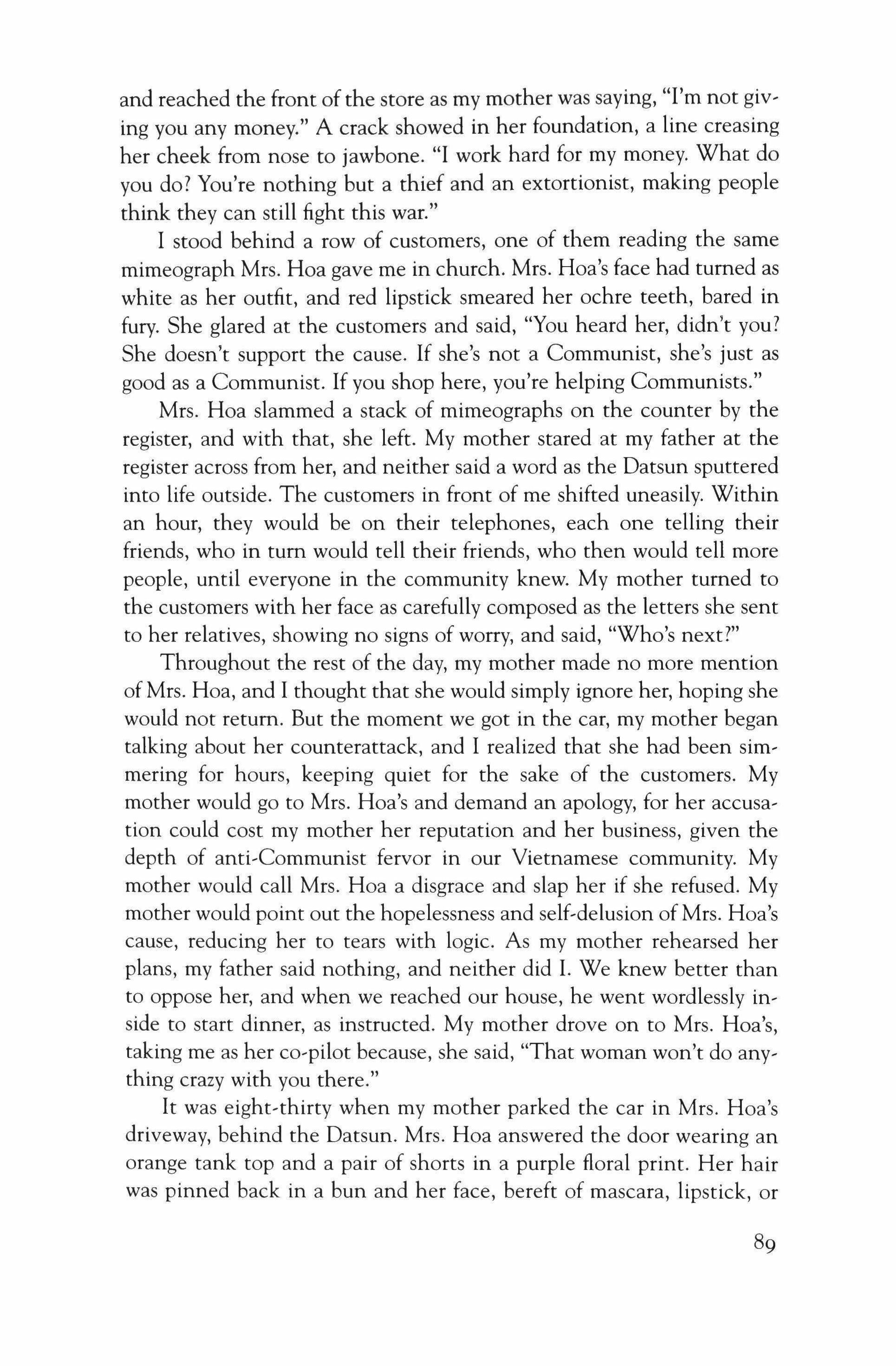
and reached the front of the store as my mother was saying, "I'm not giving you any money." A crack showed in her foundation, a line creasing her cheek from nose to jawbone. "I work hard for my money. What do you do? You're nothing but a thief and an extortionist, making people think they can still fight this war."
I stood behind a row of customers, one of them reading the same mimeograph Mrs. Hoa gave me in church. Mrs. Hoa's face had turned as white as her outfit, and red lipstick smeared her ochre teeth, bared in fury. She glared at the customers and said, "You heard her, didn't you? She doesn't support the cause. If she's not a Communist, she's just as good as a Communist. If you shop here, you're helping Communists."
Mrs. Hoa slammed a stack of mimeographs on the counter by the register, and with that, she left. My mother stared at my father at the register across from her, and neither said a word as the Datsun sputtered into life outside. The customers in front of me shifted uneasily. Within an hour, they would be on their telephones, each one telling their friends, who in tum would tell their friends, who then would tell more people, until everyone in the community knew. My mother turned to the customers with her face as carefully composed as the letters she sent to her relatives, showing no signs of worry, and said, "Who's next?"
Throughout the rest of the day, my mother made no more mention of Mrs. Hoa, and I thought that she would simply ignore her, hoping she would not return. But the moment we got in the car, my mother began talking about her counterattack, and I realized that she had been simmering for hours, keeping quiet for the sake of the customers. My mother would go to Mrs. Hoa's and demand an apology, for her accusation could cost my mother her reputation and her business, given the depth of anti-Communist fervor in our Vietnamese community. My mother would call Mrs. Hoa a disgrace and slap her if she refused. My mother would point out the hopelessness and self-delusion of Mrs. Hoa's cause, reducing her to tears with logic. As my mother rehearsed her plans, my father said nothing, and neither did I. We knew better than to oppose her, and when we reached our house, he went wordlessly inside to start dinner, as instructed. My mother drove on to Mrs. Hoa's, taking me as her co-pilot because, she said, "That woman won't do anything crazy with you there."
It was eight-thirty when my mother parked the car in Mrs. Hoa's driveway, behind the Datsun. Mrs. Hoa answered the door wearing an orange tank top and a pair of shorts in a purple floral print. Her hair was pinned back in a bun and her face, bereft of mascara, lipstick, or
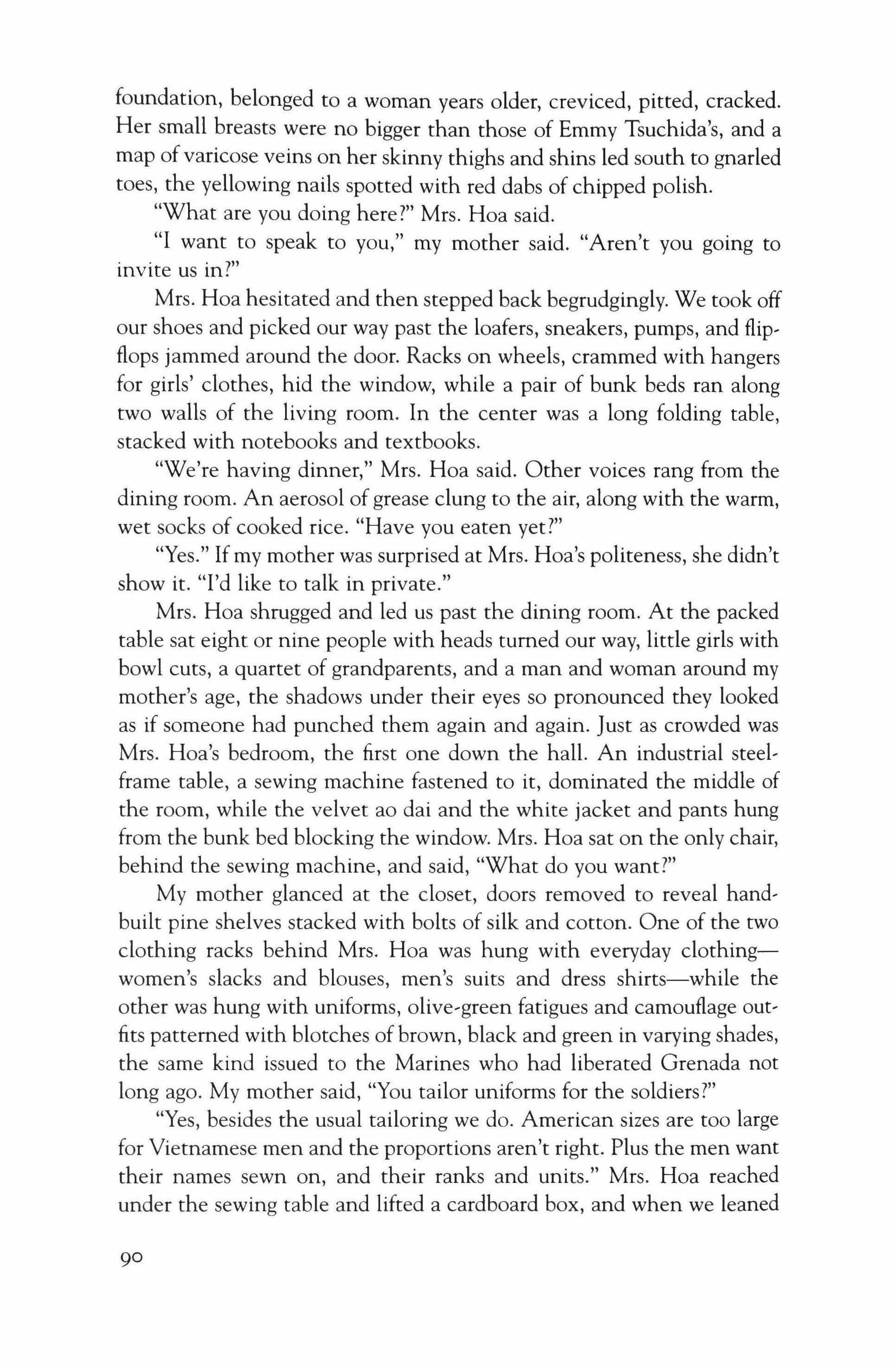
foundation, belonged to a woman years older, creviced, pitted, cracked. Her small breasts were no bigger than those of Emmy Tsuchida's, and a map of varicose veins on her skinny thighs and shins led south to gnarled toes, the yellowing nails spotted with red dabs of chipped polish.
"What are you doing here?" Mrs. Hoa said.
"I want to speak to you," my mother said. "Aren't you going to invite us in?"
Mrs. Hoa hesitated and then stepped back begrudgingly. We took off our shoes and picked our way past the loafers, sneakers, pumps, and flipflops jammed around the door. Racks on wheels, crammed with hangers for girls' clothes, hid the window, while a pair of bunk beds ran along two walls of the living room. In the center was a long folding table, stacked with notebooks and textbooks.
"We're having dinner," Mrs. Hoa said. Other voices rang from the dining room. An aerosol of grease clung to the air, along with the warm, wet socks of cooked rice. "Have you eaten yet?"
"Yes." If my mother was surprised at Mrs. Hoa's politeness, she didn't show it. "I'd like to talk in private."
Mrs. Hoa shrugged and led us past the dining room. At the packed table sat eight or nine people with heads turned our way, little girls with bowl cuts, a quartet of grandparents, and a man and woman around my mother's age, the shadows under their eyes so pronounced they looked as if someone had punched them again and again. Just as crowded was Mrs. Hoa's bedroom, the first one down the hall. An industrial steelframe table, a sewing machine fastened to it, dominated the middle of the room, while the velvet ao dai and the white jacket and pants hung from the bunk bed blocking the window. Mrs. Hoa sat on the only chair, behind the sewing machine, and said, "What do you want?"
My mother glanced at the closet, doors removed to reveal handbuilt pine shelves stacked with bolts of silk and cotton. One of the two clothing racks behind Mrs. Hoa was hung with everyday clothingwomen's slacks and blouses, men's suits and dress shirts-while the other was hung with uniforms, olive-green fatigues and camouflage outfits patterned with blotches of brown, black and green in varying shades, the same kind issued to the Marines who had liberated Grenada not long ago. My mother said, "You tailor uniforms for the soldiers?"
"Yes, besides the usual tailoring we do. American sizes are too large for Vietnamese men and the proportions aren't right. Plus the men want their names sewn on, and their ranks and units." Mrs. Hoa reached under the sewing table and lifted a cardboard box, and when we leaned
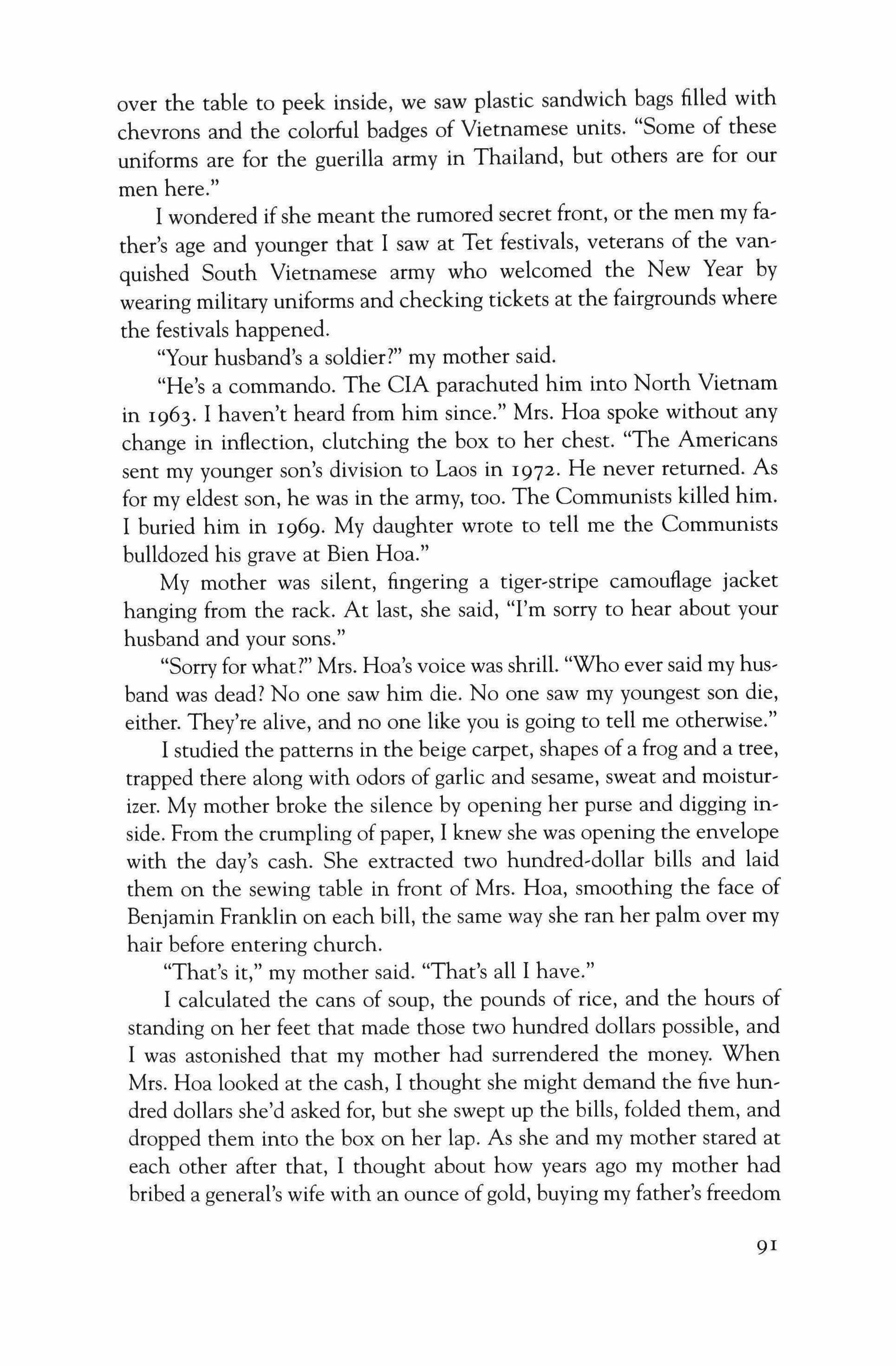
over the table to peek inside, we saw plastic sandwich bags filled with chevrons and the colorful badges of Vietnamese units. "Some of these uniforms are for the guerilla army in Thailand, but others are for our men here."
I wondered if she meant the rumored secret front, or the men my father's age and younger that I saw at Tet festivals, veterans of the vanquished South Vietnamese army who welcomed the New Year by wearing military uniforms and checking tickets at the fairgrounds where the festivals happened.
"Your husband's a soldier?" my mother said.
"He's a commando. The CIA parachuted him into North Vietnam in 1963. I haven't heard from him since." Mrs. Hoa spoke without any change in inflection, clutching the box to her chest. "The Americans sent my younger son's division to Laos in 1972. He never returned. As for my eldest son, he was in the army, too. The Communists killed him. I buried him in 1969. My daughter wrote to tell me the Communists bulldozed his grave at Bien Hoa."
My mother was silent, fingering a tiger-stripe camouflage jacket hanging from the rack. At last, she said, "I'm sorry to hear about your husband and your sons."
"Sorry for what?" Mrs. Hoa's voice was shrill. "Who ever said my husband was dead? No one saw him die. No one saw my youngest son die, either. They're alive, and no one like you is going to tell me otherwise."
I studied the patterns in the beige carpet, shapes of a frog and a tree, trapped there along with odors of garlic and sesame, sweat and moisturizer. My mother broke the silence by opening her purse and digging inside. From the crumpling of paper, I knew she was opening the envelope with the day's cash. She extracted two hundred-dollar bills and laid them on the sewing table in front of Mrs. Hoa, smoothing the face of Benjamin Franklin on each bill, the same way she ran her palm over my hair before entering church.
"That's it," my mother said. "That's all I have."
I calculated the cans of soup, the pounds of rice, and the hours of standing on her feet that made those two hundred dollars possible, and I was astonished that my mother had surrendered the money. When Mrs. Hoa looked at the cash, I thought she might demand the five hundred dollars she'd asked for, but she swept up the bills, folded them, and dropped them into the box on her lap. As she and my mother stared at each other after that, I thought about how years ago my mother had bribed a general's wife with an ounce ofgold, buying my father's freedom
91
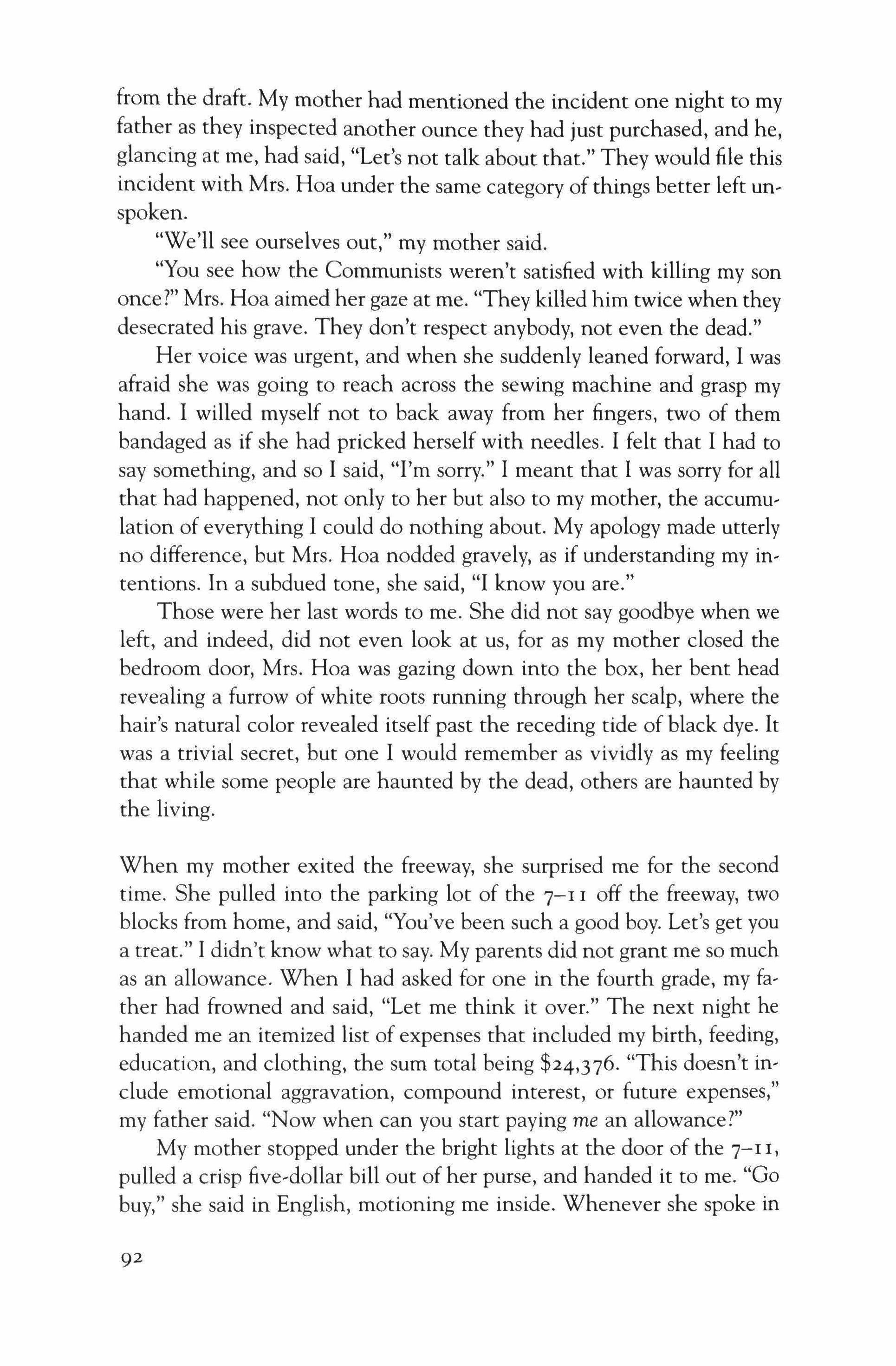
from the draft. My mother had mentioned the incident one night to my father as they inspected another ounce they had just purchased, and he, glancing at me, had said, "Let's not talk about that." They would file this incident with Mrs. Hoa under the same category of things better left unspoken.
"We'll see ourselves out," my mother said.
"You see how the Communists weren't satisfied with killing my son once?" Mrs. Hoa aimed her gaze at me. "They killed him twice when they desecrated his grave. They don't respect anybody, not even the dead."
Her voice was urgent, and when she suddenly leaned forward, I was afraid she was going to reach across the sewing machine and grasp my hand. I willed myself not to back away from her fingers, two of them bandaged as if she had pricked herself with needles. I felt that I had to say something, and so I said, "I'm sorry." I meant that I was sorry for all that had happened, not only to her but also to my mother, the accumulation of everything I could do nothing about. My apology made utterly no difference, but Mrs. Hoa nodded gravely, as if understanding my in' tentions. In a subdued tone, she said, "I know you are."
Those were her last words to me. She did not say goodbye when we left, and indeed, did not even look at us, for as my mother closed the bedroom door, Mrs. Hoa was gazing down into the box, her bent head revealing a furrow of white roots running through her scalp, where the hair's natural color revealed itself past the receding tide of black dye. It was a trivial secret, but one I would remember as vividly as my feeling that while some people are haunted by the dead, others are haunted by the living.
When my mother exited the freeway, she surprised me for the second time. She pulled into the parking lot of the 7-1 I off the freeway, two blocks from home, and said, "You've been such a good boy. Let's get you a treat." I didn't know what to say. My parents did not grant me so much as an allowance. When I had asked for one in the fourth grade, my fa, ther had frowned and said, "Let me think it over." The next night he handed me an itemized list of expenses that included my birth, feeding, education, and clothing, the sum total being $24,376. "This doesn't in' elude emotional aggravation, compound interest, or future expenses," my father said. "Now when can you start paying me an allowance?"
My mother stopped under the bright lights at the door of the 7-1 I, pulled a crisp five-dollar bill out of her purse, and handed it to me. "Go buy," she said in English, motioning me inside. Whenever she spoke in
92
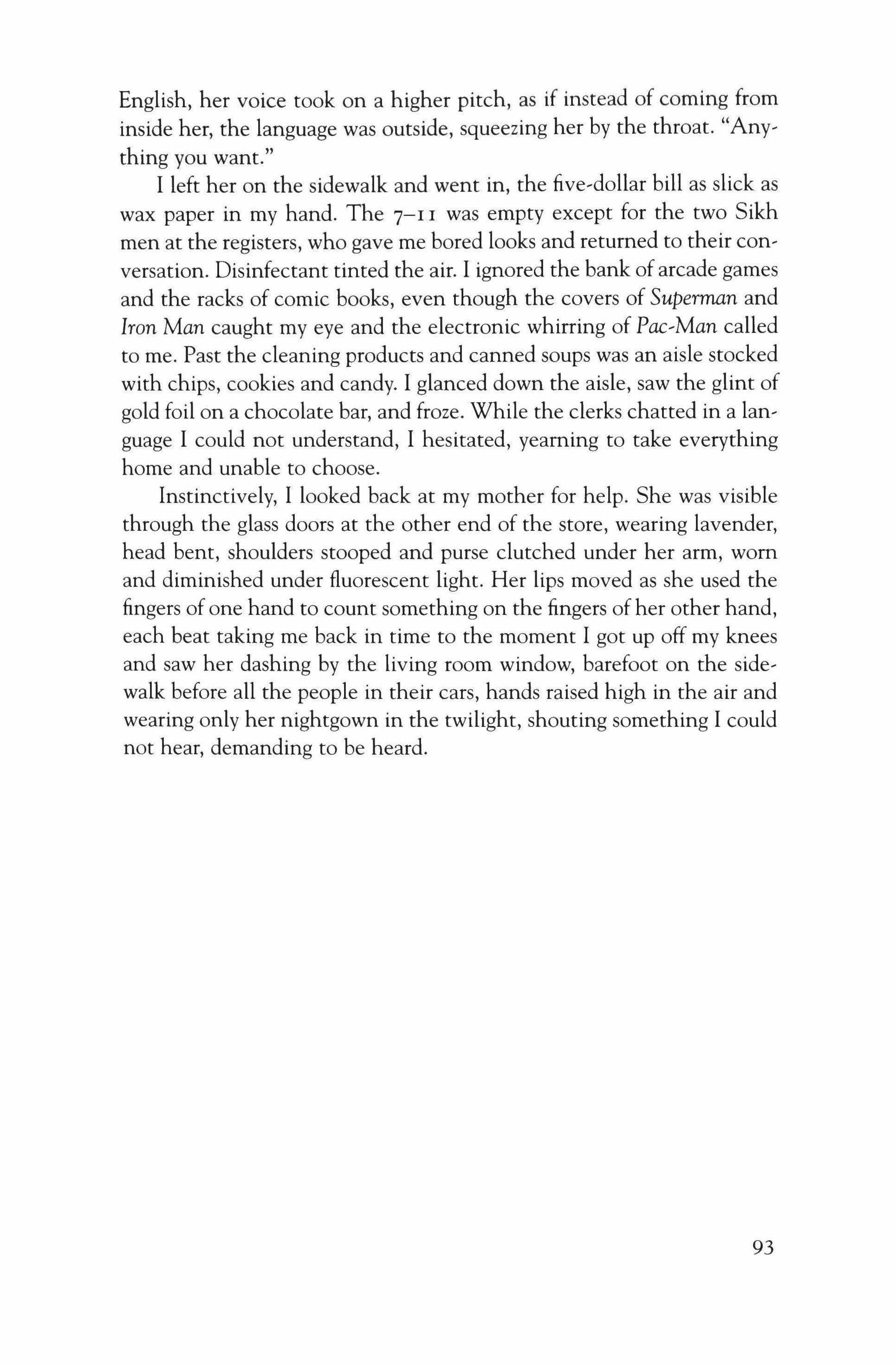
English, her voice took on a higher pitch, as if instead of coming from inside her, the language was outside, squeezing her by the throat. "Anything you want."
I left her on the sidewalk and went in, the five-dollar bill as slick as wax paper in my hand. The 7-11 was empty except for the two Sikh men at the registers, who gave me bored looks and returned to their conversation. Disinfectant tinted the air. I ignored the bank of arcade games and the racks of comic books, even though the covers of Superman and Iron Man caught my eye and the electronic whirring of Pac-Man called to me. Past the cleaning products and canned soups was an aisle stocked with chips, cookies and candy. I glanced down the aisle, saw the glint of gold foil on a chocolate bar, and froze. While the clerks chatted in a language I could not understand, I hesitated, yearning to take everything home and unable to choose.
Instinctively, I looked back at my mother for help. She was visible through the glass doors at the other end of the store, wearing lavender, head bent, shoulders stooped and purse clutched under her arm, worn and diminished under fluorescent light. Her lips moved as she used the fingers of one hand to count something on the fingers of her other hand, each beat taking me back in time to the moment I got up off my knees and saw her dashing by the living room window, barefoot on the sidewalk before all the people in their cars, hands raised high in the air and wearing only her nightgown in the twilight, shouting something I could not hear, demanding to be heard.
93
Eileen Favorite
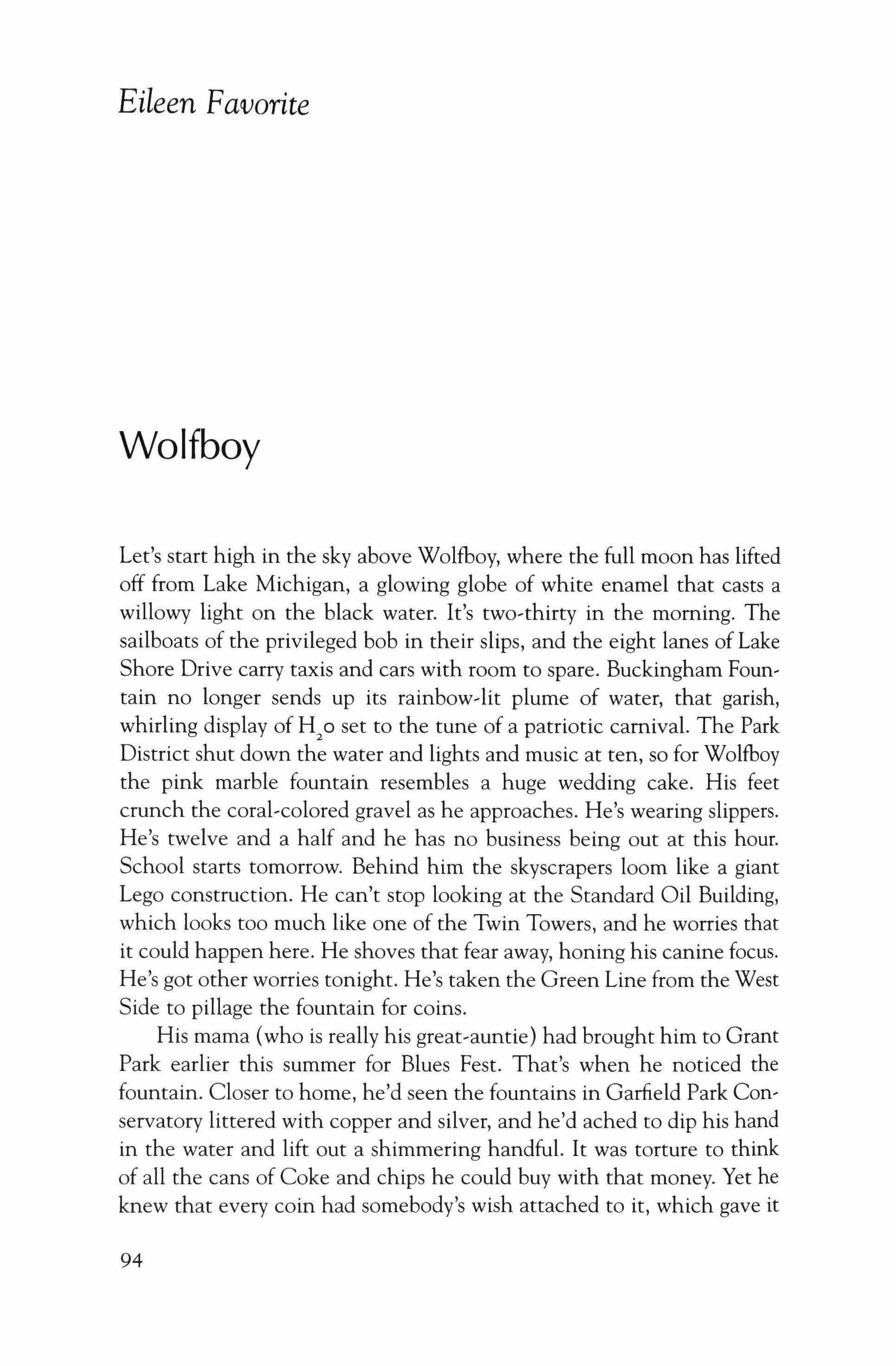
Wolfboy
Let's start high in the sky above Wolfboy, where the full moon has lifted off from Lake Michigan, a glowing globe of white enamel that casts a willowy light on the black water. It's two-thirty in the morning. The sailboats of the privileged bob in their slips, and the eight lanes of Lake Shore Drive carry taxis and cars with room to spare. Buckingham Fountain no longer sends up its rainbow-lit plume of water, that garish, whirling display of H2o set to the tune of a patriotic carnival. The Park District shut down the water and lights and music at ten, so for Wolfboy the pink marble fountain resembles a huge wedding cake. His feet crunch the coral-colored gravel as he approaches. He's wearing slippers. He's twelve and a half and he has no business being out at this hour. School starts tomorrow. Behind him the skyscrapers loom like a giant Lego construction. He can't stop looking at the Standard Oil Building, which looks too much like one of the Twin Towers, and he worries that it could happen here. He shoves that fear away, honing his canine focus. He's got other worries tonight. He's taken the Green Line from the West Side to pillage the fountain for coins.
His mama (who is really his great-auntie) had brought him to Grant Park earlier this summer for Blues Fest. That's when he noticed the fountain. Closer to home, he'd seen the fountains in Garfield Park Conservatory littered with copper and silver, and he'd ached to dip his hand in the water and lift out a shimmering handful. It was torture to think of all the cans of Coke and chips he could buy with that money. Yet he knew that every coin had somebody's wish attached to it, which gave it
94
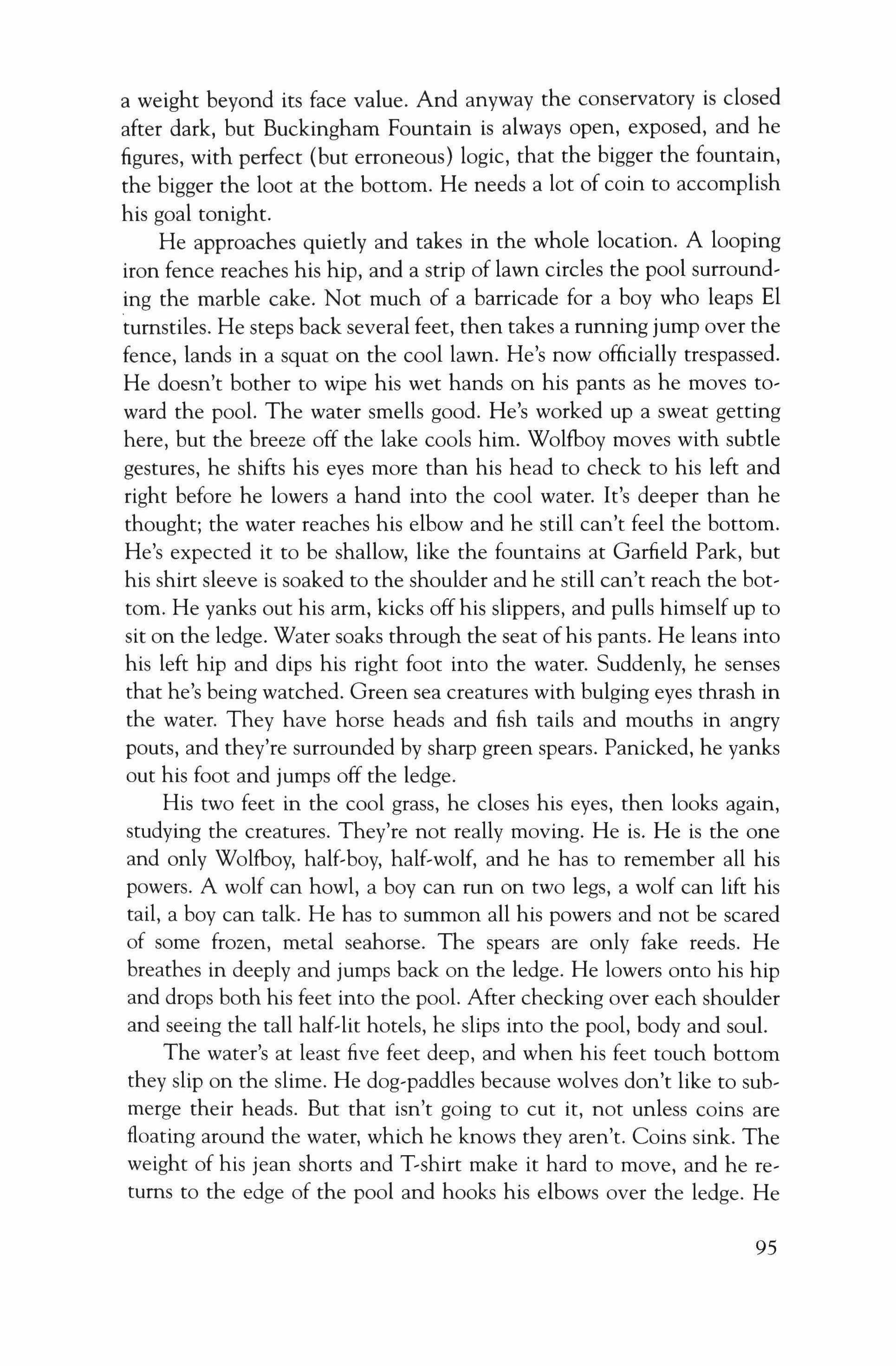
a weight beyond its face value. And anyway the conservatory is closed after dark, but Buckingham Fountain is always open, exposed, and he figures, with perfect (but erroneous) logic, that the bigger the fountain, the bigger the loot at the bottom. He needs a lot of coin to accomplish his goal tonight.
He approaches quietly and takes in the whole location. A looping iron fence reaches his hip, and a strip of lawn circles the pool surrounding the marble cake. Not much of a barricade for a boy who leaps EI turnstiles. He steps back several feet, then takes a running jump over the fence, lands in a squat on the cool lawn. He's now officially trespassed. He doesn't bother to wipe his wet hands on his pants as he moves toward the pool. The water smells good. He's worked up a sweat getting here, but the breeze off the lake cools him. Wolfboy moves with subtle gestures, he shifts his eyes more than his head to check to his left and right before he lowers a hand into the cool water. It's deeper than he thought; the water reaches his elbow and he still can't feel the bottom. He's expected it to be shallow, like the fountains at Garfield Park, but his shirt sleeve is soaked to the shoulder and he still can't reach the bottom. He yanks out his arm, kicks off his slippers, and pulls himself up to sit on the ledge. Water soaks through the seat ofhis pants. He leans into his left hip and dips his right foot into the water. Suddenly, he senses that he's being watched. Green sea creatures with bulging eyes thrash in the water. They have horse heads and fish tails and mouths in angry pouts, and they're surrounded by sharp green spears. Panicked, he yanks out his foot and jumps off the ledge.
His two feet in the cool grass, he closes his eyes, then looks again, studying the creatures. They're not really moving. He is. He is the one and only Wolfboy, half-boy, half-wolf, and he has to remember all his powers. A wolf can howl, a boy can run on two legs, a wolf can lift his tail, a boy can talk. He has to summon all his powers and not be scared of some frozen, metal seahorse. The spears are only fake reeds. He breathes in deeply and jumps back on the ledge. He lowers onto his hip and drops both his feet into the pool. After checking over each shoulder and seeing the tall half-lit hotels, he slips into the pool, body and soul.
The water's at least five feet deep, and when his feet touch bottom they slip on the slime. He dog-paddles because wolves don't like to submerge their heads. But that isn't going to cut it, not unless coins are floating around the water, which he knows they aren't. Coins sink. The weight of his jean shorts and T-shirt make it hard to move, and he returns to the edge of the pool and hooks his elbows over the ledge. He
95
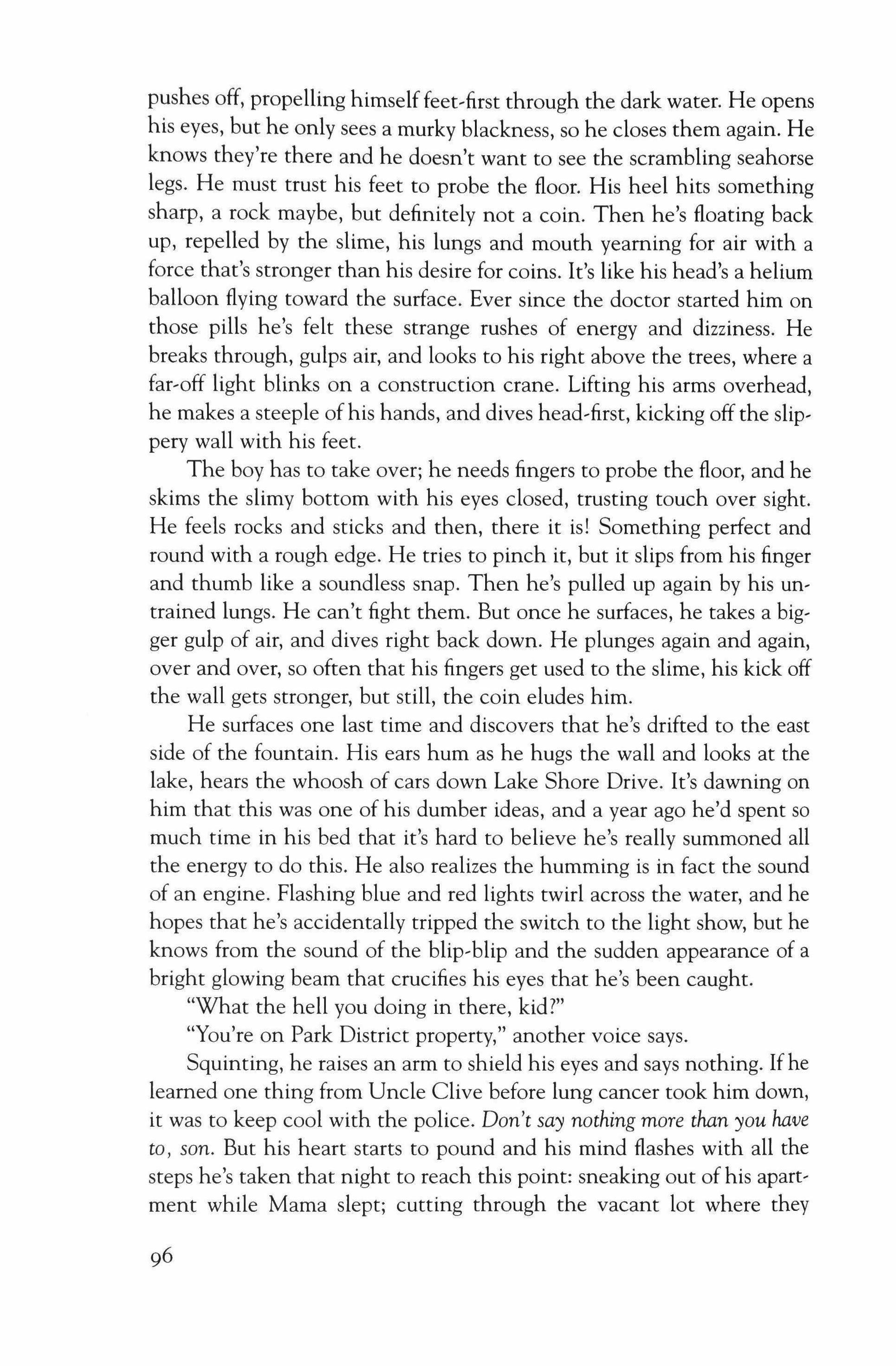
pushes off, propelling himselffeet-first through the dark water. He opens his eyes, but he only sees a murky blackness, so he closes them again. He knows they're there and he doesn't want to see the scrambling seahorse legs. He must trust his feet to probe the floor. His heel hits something sharp, a rock maybe, but definitely not a coin. Then he's floating back up, repelled by the slime, his lungs and mouth yearning for air with a force that's stronger than his desire for coins. It's like his head's a helium balloon flying toward the surface. Ever since the doctor started him on those pills he's felt these strange rushes of energy and dizziness. He breaks through, gulps air, and looks to his right above the trees, where a far-off light blinks on a construction crane. Lifting his arms overhead, he makes a steeple ofhis hands, and dives head-first, kicking off the slippery wall with his feet.
The boy has to take over; he needs fingers to probe the floor, and he skims the slimy bottom with his eyes closed, trusting touch over sight. He feels rocks and sticks and then, there it is! Something perfect and round with a rough edge. He tries to pinch it, but it slips from his finger and thumb like a soundless snap. Then he's pulled up again by his untrained lungs. He can't fight them. But once he surfaces, he takes a bigger gulp of air, and dives right back down. He plunges again and again, over and over, so often that his fingers get used to the slime, his kick off the wall gets stronger, but still, the coin eludes him.
He surfaces one last time and discovers that he's drifted to the east side of the fountain. His ears hum as he hugs the wall and looks at the lake, hears the whoosh of cars down Lake Shore Drive. It's dawning on him that this was one of his dumber ideas, and a year ago he'd spent so much time in his bed that it's hard to believe he's really summoned all the energy to do this. He also realizes the humming is in fact the sound of an engine. Flashing blue and red lights twirl across the water, and he hopes that he's accidentally tripped the switch to the light show, but he knows from the sound of the blip-blip and the sudden appearance of a bright glowing beam that crucifies his eyes that he's been caught.
"What the hell you doing in there, kid?"
"You're on Park District property," another voice says.
Squinting, he raises an arm to shield his eyes and says nothing. Ifhe learned one thing from Uncle Clive before lung cancer took him down, it was to keep cool with the police. Don't say nothing more than you have to, son. But his heart starts to pound and his mind flashes with all the steps he's taken that night to reach this point: sneaking out of his apartment while Mama slept; cutting through the vacant lot where they
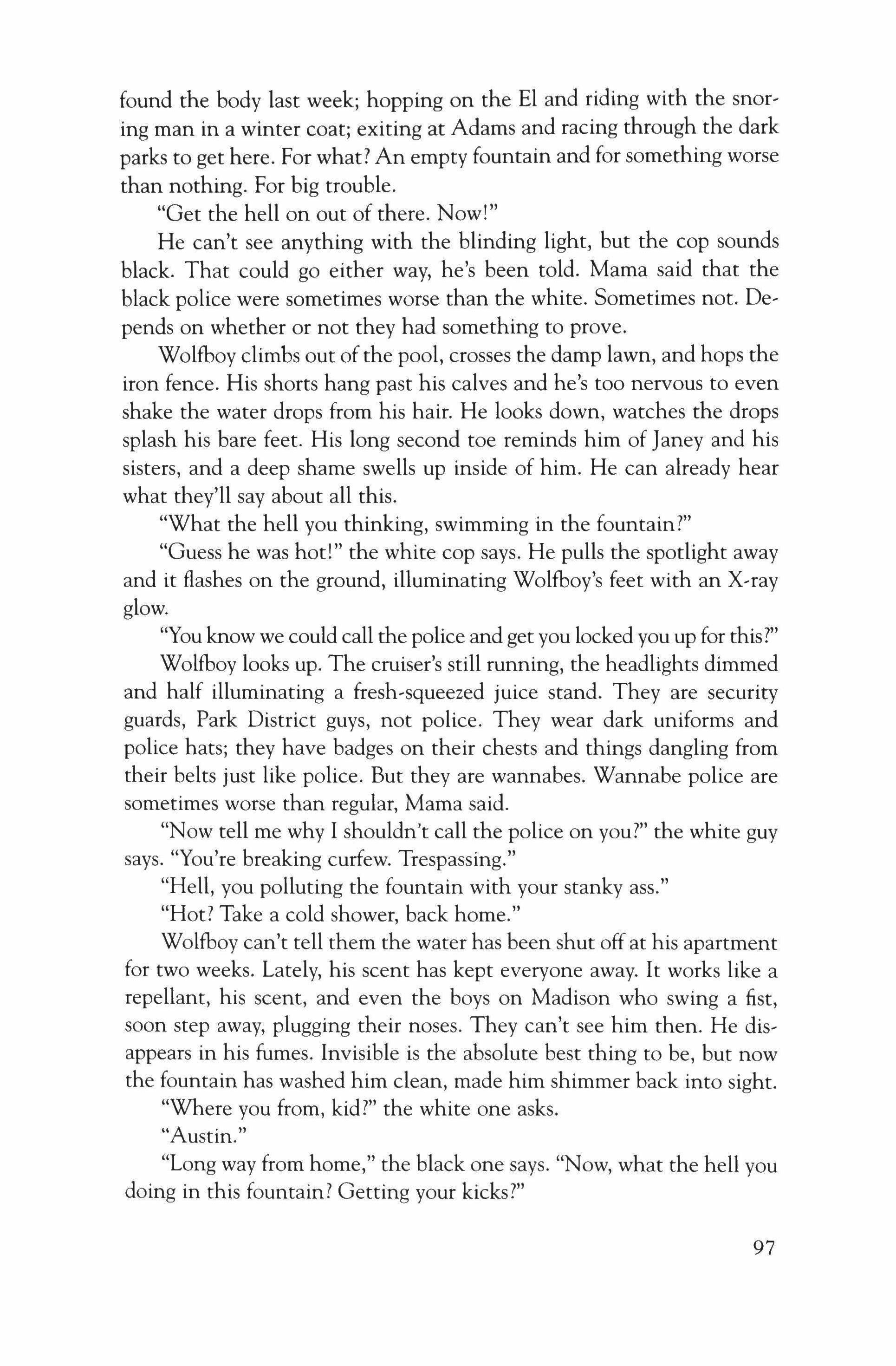
found the body last week; hopping on the EI and riding with the snoring man in a winter coat; exiting at Adams and racing through the dark parks to get here. For what? An empty fountain and for something worse than nothing. For big trouble.
"Get the hell on out of there. Now!"
He can't see anything with the blinding light, but the cop sounds black. That could go either way, he's been told. Marna said that the black police were sometimes worse than the white. Sometimes not. Depends on whether or not they had something to prove.
Wolfboy climbs out ofthe pool, crosses the damp lawn, and hops the iron fence. His shorts hang past his calves and he's too nervous to even shake the water drops from his hair. He looks down, watches the drops splash his bare feet. His long second toe reminds him of Janey and his sisters, and a deep shame swells up inside of him. He can already hear what they'll say about all this.
"What the hell you thinking, swimming in the fountain?"
"Guess he was hot!" the white cop says. He pulls the spotlight away and it flashes on the ground, illuminating Wolfboy's feet with an Xvray glow.
"You know we could call the police and get you locked you up for this?"
Wolfboy looks up. The cruiser's still running, the headlights dimmed and half illuminating a fresh-squeezed juice stand. They are security guards, Park District guys, not police. They wear dark uniforms and police hats; they have badges on their chests and things dangling from their belts just like police. But they are wannabes. Wannabe police are sometimes worse than regular, Marna said.
"Now tell me why I shouldn't call the police on you?" the white guy says. "You're breaking curfew. Trespassing."
"Hell, you polluting the fountain with your stanky ass."
"Hot? Take a cold shower, back horne."
Wolfboy can't tell them the water has been shut off at his apartment for two weeks. Lately, his scent has kept everyone away. It works like a repellant, his scent, and even the boys on Madison who swing a fist, soon step away, plugging their noses. They can't see him then. He disappears in his fumes. Invisible is the absolute best thing to be, but now the fountain has washed him clean, made him shimmer back into sight.
"Where you from, kid?" the white one asks. "Austin."
"Long way from horne," the black one says. "Now, what the hell you doing in this fountain? Getting your kicks?"
97
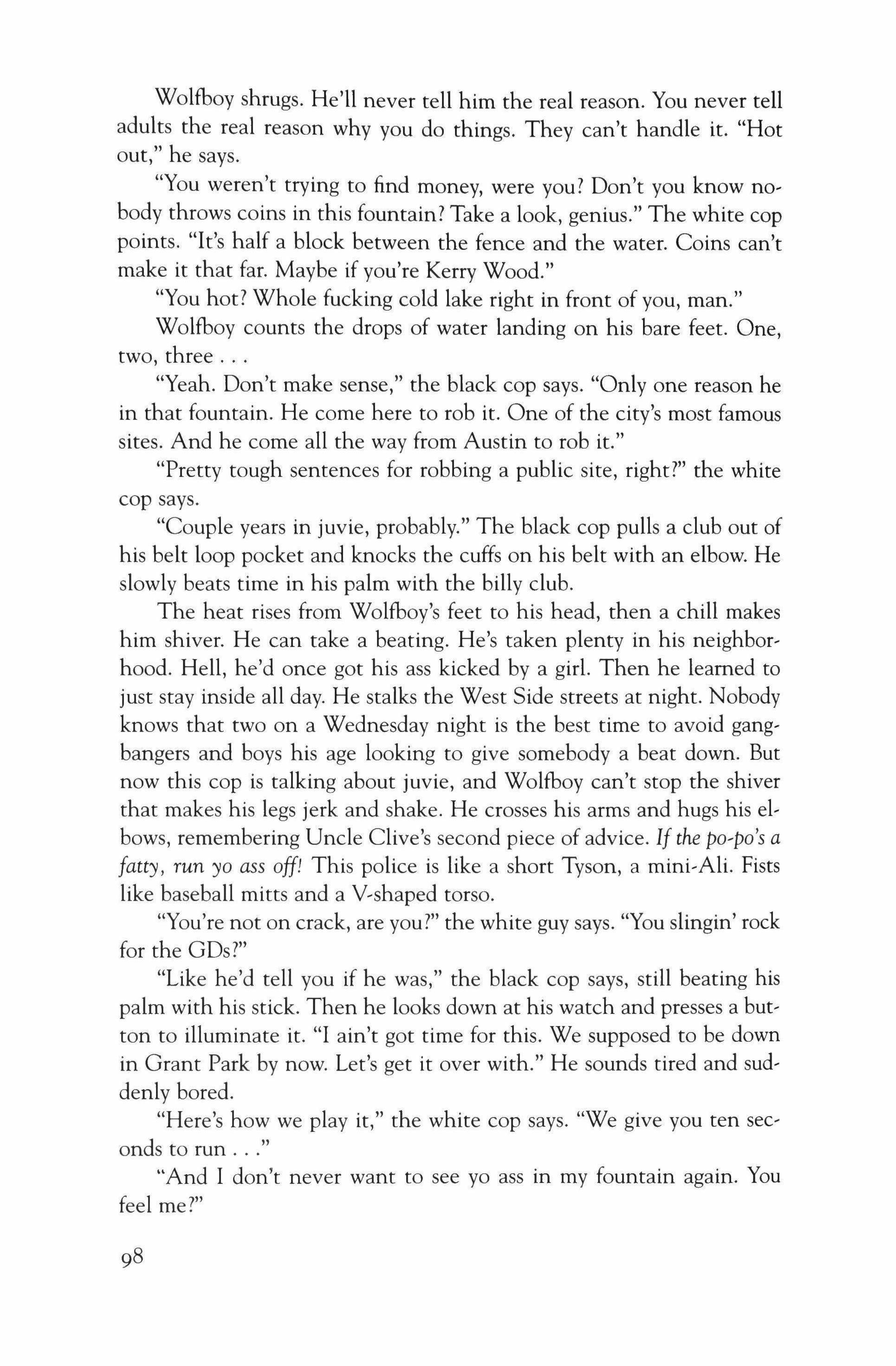
Wolfboy shrugs. He'll never tell him the real reason. You never tell adults the real reason why you do things. They can't handle it. "Hot out," he says.
"You weren't trying to find money, were you? Don't you know nobody throws coins in this fountain? Take a look, genius." The white cop points. "It's half a block between the fence and the water. Coins can't make it that far. Maybe if you're Kerry Wood."
"You hot? Whole fucking cold lake right in front of you, man."
Wolfboy counts the drops of water landing on his bare feet. One, two, three
"Yeah. Don't make sense," the black cop says. "Only one reason he in that fountain. He come here to rob it. One of the city's most famous sites. And he come all the way from Austin to rob it."
"Pretty tough sentences for robbing a public site, right?" the white cop says.
"Couple years in juvie, probably." The black cop pulls a club out of his belt loop pocket and knocks the cuffs on his belt with an elbow. He slowly beats time in his palm with the billy club.
The heat rises from Wolfboy's feet to his head, then a chill makes him shiver. He can take a beating. He's taken plenty in his neighborhood. Hell, he'd once got his ass kicked by a girl. Then he learned to just stay inside all day. He stalks the West Side streets at night. Nobody knows that two on a Wednesday night is the best time to avoid gangbangers and boys his age looking to give somebody a beat down. But now this cop is talking about juvie, and Wolfboy can't stop the shiver that makes his legs jerk and shake. He crosses his arms and hugs his elbows, remembering Uncle Clive's second piece of advice. If the po-pe': a fatty, run yo ass off! This police is like a short Tyson, a mini-Ali. Fists like baseball mitts and a V-shaped torso.
"You're not on crack, are you?" the white guy says. "You slingin' rock for the GDs?"
"Like he'd tell you if he was," the black cop says, still beating his palm with his stick. Then he looks down at his watch and presses a button to illuminate it. "I ain't got time for this. We supposed to be down in Grant Park by now. Let's get it over with." He sounds tired and suddenly bored.
"Here's how we play it," the white cop says. "We give you ten seconds to run
"And I don't never want to see yo ass in my fountain again. You feel me?"
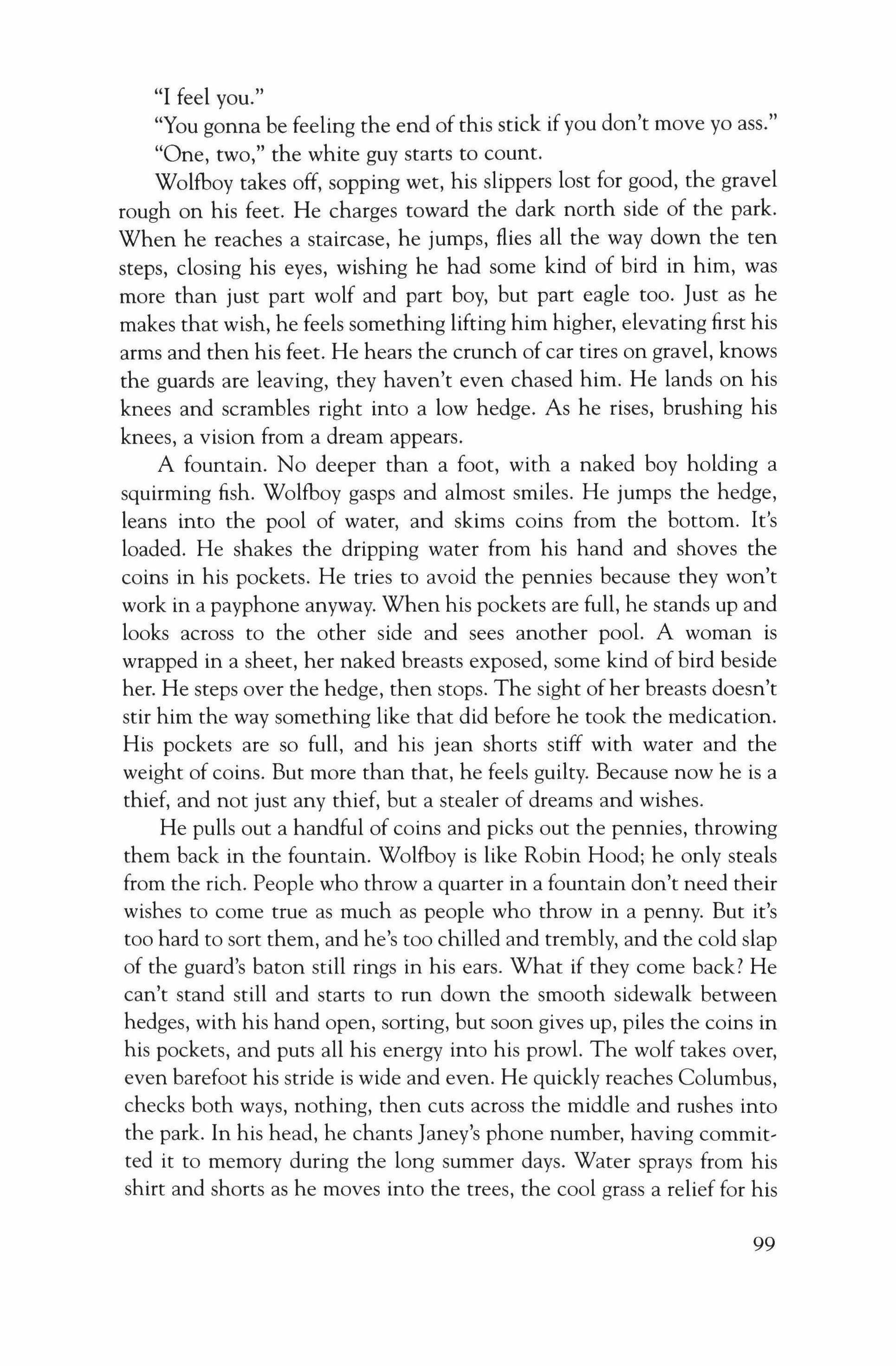
"I feel you."
"You gonna be feeling the end of this stick if you don't move yo ass."
"One, two," the white guy starts to count.
Wolfboy takes off, sopping wet, his slippers lost for good, the gravel rough on his feet. He charges toward the dark north side of the park. When he reaches a staircase, he jumps, flies all the way down the ten steps, closing his eyes, wishing he had some kind of bird in him, was more than just part wolf and part boy, but part eagle too. Just as he makes that wish, he feels something lifting him higher, elevating first his arms and then his feet. He hears the crunch of car tires on gravel, knows the guards are leaving, they haven't even chased him. He lands on his knees and scrambles right into a low hedge. As he rises, brushing his knees, a vision from a dream appears.
A fountain. No deeper than a foot, with a naked boy holding a squirming fish. Wolfboy gasps and almost smiles. He jumps the hedge, leans into the pool of water, and skims coins from the bottom. It's loaded. He shakes the dripping water from his hand and shoves the coins in his pockets. He tries to avoid the pennies because they won't work in a payphone anyway. When his pockets are full, he stands up and looks across to the other side and sees another pool. A woman is wrapped in a sheet, her naked breasts exposed, some kind of bird beside her. He steps over the hedge, then stops. The sight ofher breasts doesn't stir him the way something like that did before he took the medication. His pockets are so full, and his jean shorts stiff with water and the weight of coins. But more than that, he feels guilty. Because now he is a thief, and not just any thief, but a stealer of dreams and wishes.
He pulls out a handful of coins and picks out the pennies, throwing them back in the fountain. Wolfboy is like Robin Hood; he only steals from the rich. People who throw a quarter in a fountain don't need their wishes to come true as much as people who throw in a penny. But it's too hard to sort them, and he's too chilled and trembly, and the cold slap of the guard's baton still rings in his ears. What if they come back? He can't stand still and starts to run down the smooth sidewalk between hedges, with his hand open, sorting, but soon gives up, piles the coins in his pockets, and puts all his energy into his prowl. The wolf takes over, even barefoot his stride is wide and even. He quickly reaches Columbus, checks both ways, nothing, then cuts across the middle and rushes into the park. In his head, he chants Janey's phone number, having committed it to memory during the long summer days. Water sprays from his shirt and shorts as he moves into the trees, the cool grass a relief for his
99
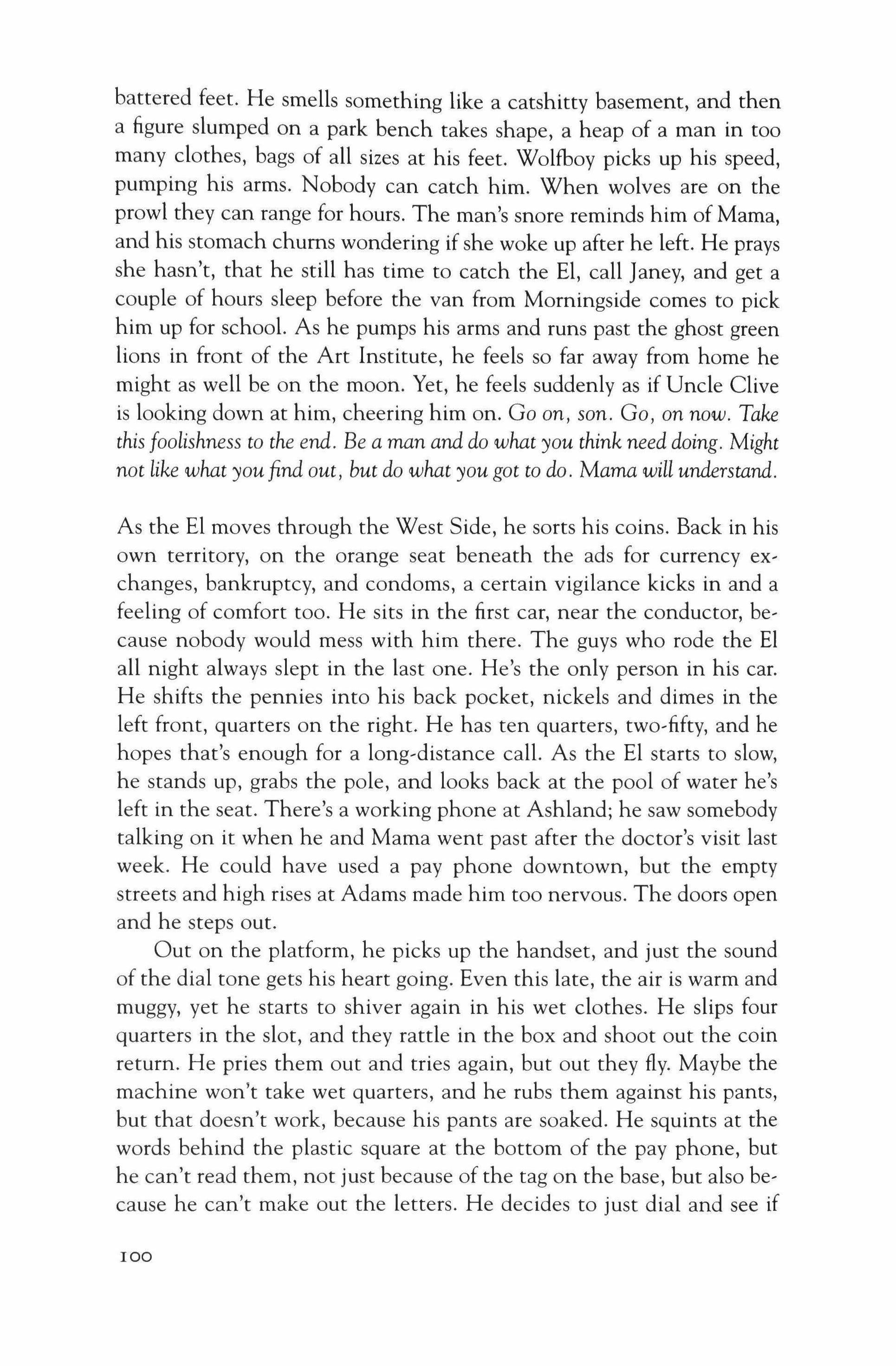
battered feet. He smells something like a catshitty basement, and then a figure slumped on a park bench takes shape, a heap of a man in too many clothes, bags of all sizes at his feet. Wolfboy picks up his speed, pumping his arms. Nobody can catch him. When wolves are on the prowl they can range for hours. The man's snore reminds him of Mama, and his stomach chums wondering if she woke up after he left. He prays she hasn't, that he still has time to catch the EI, call Janey, and get a couple of hours sleep before the van from Morningside comes to pick him up for school. As he pumps his arms and runs past the ghost green lions in front of the Art Institute, he feels so far away from home he might as well be on the moon. Yet, he feels suddenly as if Uncle Clive is looking down at him, cheering him on. Go on, son. Go, on now. Take this foolishness to the end. Be a man and do what you think need doing. Might not like what you find out, but do what you got to do. Mama will understand.
As the EI moves through the West Side, he sorts his coins. Back in his own territory, on the orange seat beneath the ads for currency exchanges, bankruptcy, and condoms, a certain vigilance kicks in and a feeling of comfort too. He sits in the first car, near the conductor, because nobody would mess with him there. The guys who rode the EI all night always slept in the last one. He's the only person in his car. He shifts the pennies into his back pocket, nickels and dimes in the left front, quarters on the right. He has ten quarters, two-fifty, and he hopes that's enough for a long-distance call. As the EI starts to slow, he stands up, grabs the pole, and looks back at the pool of water he's left in the seat. There's a working phone at Ashland; he saw somebody talking on it when he and Mama went past after the doctor's visit last week. He could have used a pay phone downtown, but the empty streets and high rises at Adams made him too nervous. The doors open and he steps out.
Out on the platform, he picks up the handset, and just the sound of the dial tone gets his heart going. Even this late, the air is warm and muggy, yet he starts to shiver again in his wet clothes. He slips four quarters in the slot, and they rattle in the box and shoot out the coin return. He pries them out and tries again, but out they fly. Maybe the machine won't take wet quarters, and he rubs them against his pants, but that doesn't work, because his pants are soaked. He squints at the words behind the plastic square at the bottom of the pay phone, but he can't read them, not just because of the tag on the base, but also because he can't make out the letters. He decides to just dial and see if
100

maybe the phone is free now, which would be cool, but a little annoy' ing after everything he's done to gather the money. He dials the ten digits, presses the headset to his ear: "One dollar seventy-five cents please. Please deposit one dollar and seventy'five for the first three minutes." He shoots one quarter after another into the slot, and the machine gulps them down. "Thank you. You have three minutes." As the phone rings, he shuts his eyes, calling on his wolf calm. He is a wolf, not a boy, and it doesn't matter if Janey says no, because a wolf can go it alone if he has to. Ever since they talked about lone wolves in science class, he understood his life in a new way. Lone wolves, Ms. Stalzer said, were the pups who'd been rejected from the pack, for being too aggressive, too weak, too something. Wolfboy didn't think he'd been too aggressive, but had he been too weak as a baby?
"Who calling so late?"
The voice sounds like Shantay's but it could be Necee, his other sis, ter, but it definitely isn't Janey, whose deep voice always sounded to him like a lady on B96. When he was little he used to mistake the lady an, nouncing the latest hit from R. Kelly for Janey, and it confused him be, cause he couldn't understand how she could be in Chicago and Detroit at the same time. Finally Mama told him not to be a fool. Janey ain't no DJ. She work in a pool hall.
"Who there?"
"Dandre. Mama there?" Calling Janey Mama makes him feel like he's doing something mean to Mama, something Uncle Clive wouldn't like.
"Dandre, why you calling here so late?"
"Mama there?" He couldn't afford to waste his precious time and money talking to anybody else. He hears her drag on a cigarette.
"I don't know where she at. She be gone all day."
"She not there?" he asks.
"Didn't I just say that? You deaf, too?"
"Sorry," he says.
"Ah, hell. Ain't no thing. Too hot to sleep here anyway. Damn school start next week."
She starts to complain about her principal, and he presses the phone to his ear, trying to figure out if it's Shantay or Necee. He doesn't know his sisters' voices well enough to guess, and ifhe guesses wrong, that may set her off. And even if it's an innocent mistake, it feels like a big one, full of meaning, and a sign that he doesn't belong in their pack. Dis, tracted, he can't follow what she's saying about getting suspended last year, the dress code, or something. He's going to waste all his money on
101
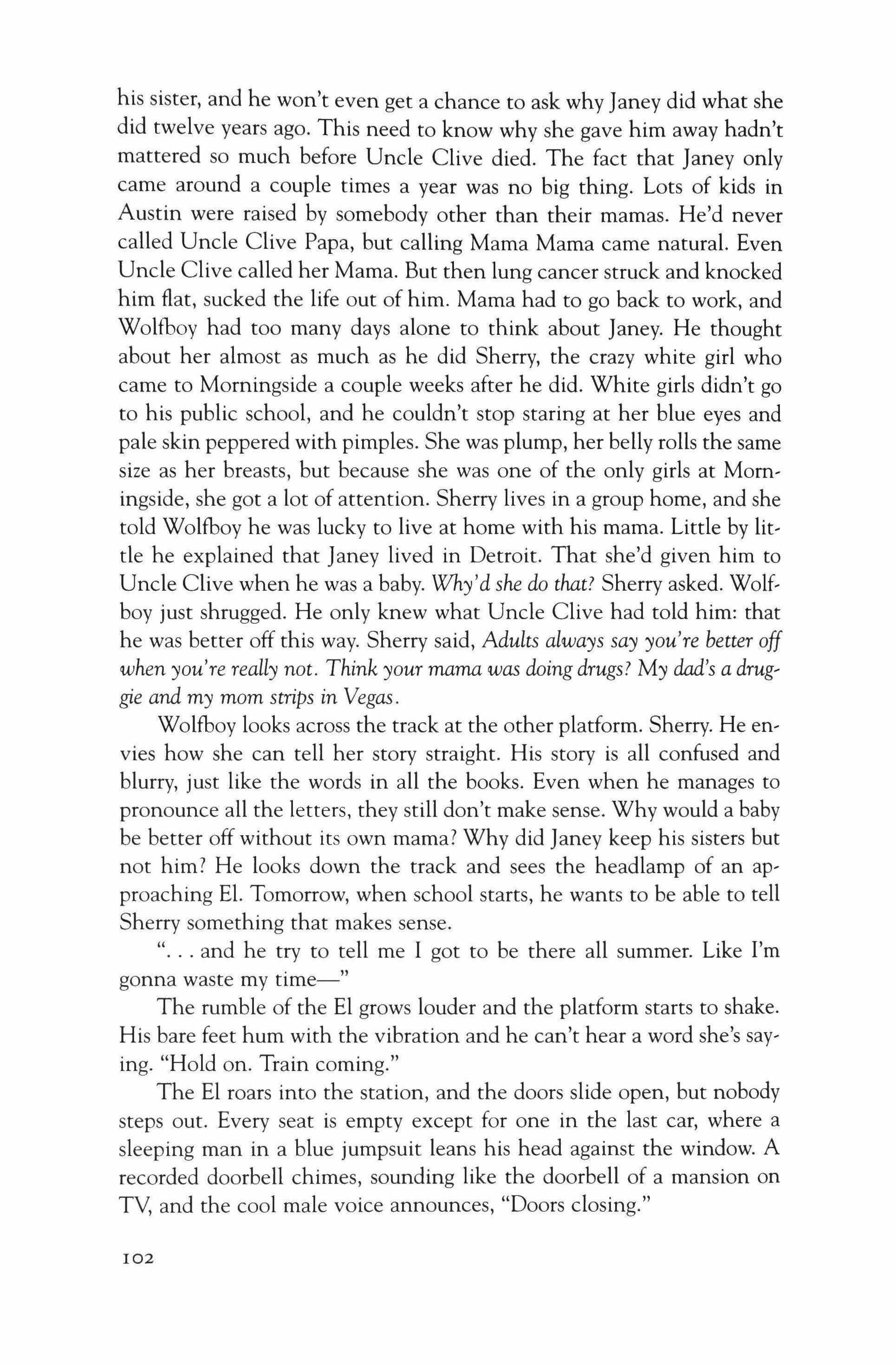
his sister, and he won't even get a chance to ask why Janey did what she did twelve years ago. This need to know why she gave him away hadn't mattered so much before Uncle Clive died. The fact that Janey only came around a couple times a year was no big thing. Lots of kids in Austin were raised by somebody other than their mamas. He'd never called Uncle Clive Papa, but calling Mama Mama came natural. Even Uncle Clive called her Mama. But then lung cancer struck and knocked him flat, sucked the life out of him. Mama had to go back to work, and Wolfboy had too many days alone to think about Janey. He thought about her almost as much as he did Sherry, the crazy white girl who came to Morningside a couple weeks after he did. White girls didn't go to his public school, and he couldn't stop staring at her blue eyes and pale skin peppered with pimples. She was plump, her belly rolls the same size as her breasts, but because she was one of the only girls at Morningside, she got a lot of attention. Sherry lives in a group home, and she told Wolfboy he was lucky to live at home with his mama. Little by little he explained that Janey lived in Detroit. That she'd given him to Uncle Clive when he was a baby. Why'd she do that? Sherry asked. Wolfboy just shrugged. He only knew what Uncle Clive had told him: that he was better off this way. Sherry said, Adults always say you're better off when you're really not. Think your mama was doingdrugs? My dad's a druggie and my mom strips in Vegas.
Wolfboy looks across the track at the other platform. Sherry. He envies how she can tell her story straight. His story is all confused and blurry, just like the words in all the books. Even when he manages to pronounce all the letters, they still don't make sense. Why would a baby be better off without its own mama? Why did Janey keep his sisters but not him? He looks down the track and sees the headlamp of an approaching El. Tomorrow, when school starts, he wants to be able to tell Sherry something that makes sense. and he try to tell me I got to be there all summer. Like I'm gonna waste my time-"
The rumble of the EI grows louder and the platform starts to shake. His bare feet hum with the vibration and he can't hear a word she's saying. "Hold on. Train coming."
The EI roars into the station, and the doors slide open, but nobody steps out. Every seat is empty except for one in the last car, where a sleeping man in a blue jumpsuit leans his head against the window. A recorded doorbell chimes, sounding like the doorbell of a mansion on TV, and the cool male voice announces, "Doors closing."
I02
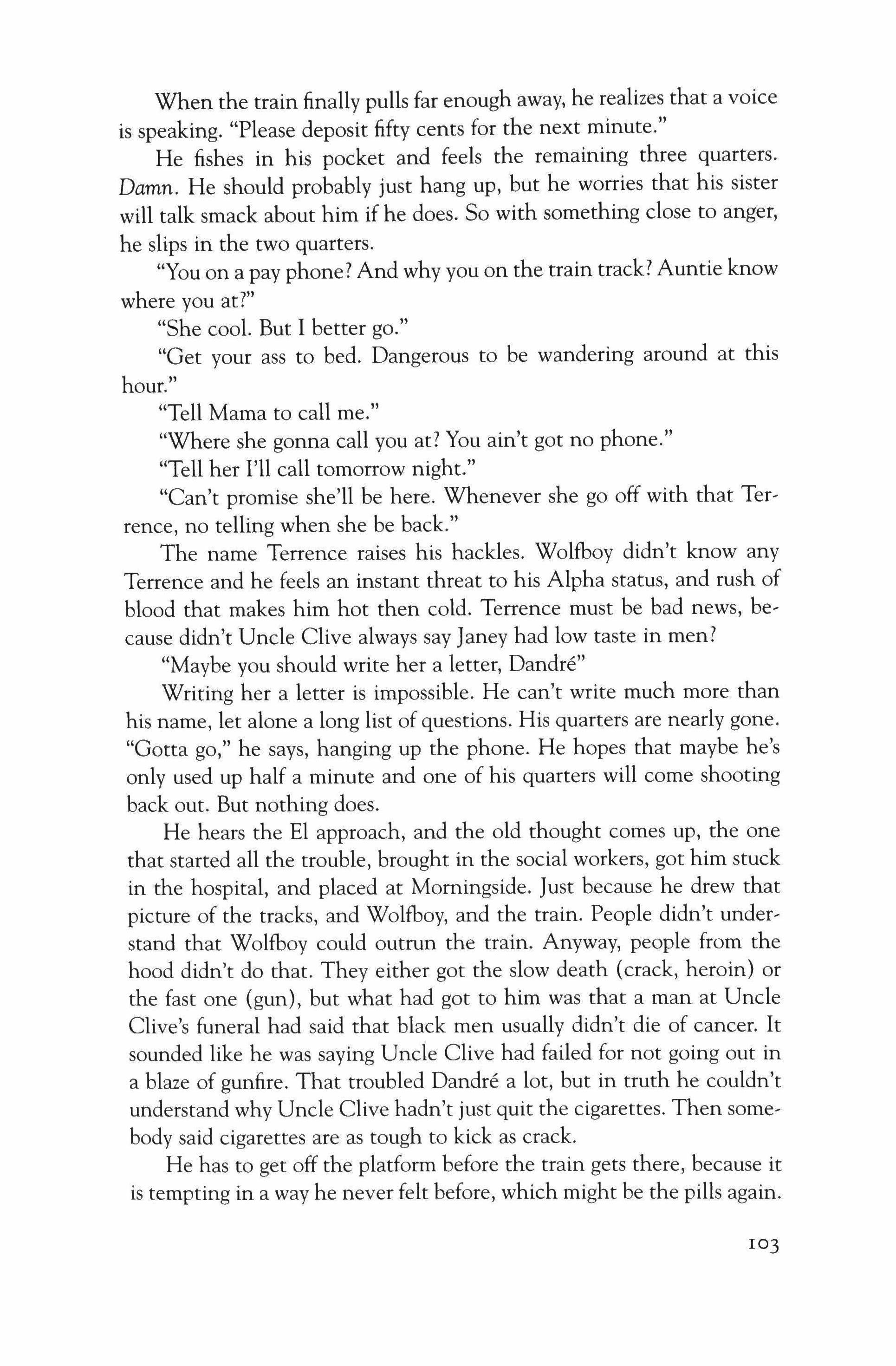
When the train finally pulls far enough away, he realizes that a voice is speaking. "Please deposit fifty cents for the next minute."
He fishes in his pocket and feels the remaining three quarters. Damn. He should probably just hang up, but he worries that his sister will talk smack about him if he does. So with something close to anger, he slips in the two quarters.
"You on a pay phone? And why you on the train track? Auntie know where you at?"
"She cool. But I better go."
"Get your ass to bed. Dangerous to be wandering around at this hour."
"Tell Mama to call me."
"Where she gonna call you at? You ain't got no phone."
"Tell her I'll call tomorrow night."
"Can't promise she'll be here. Whenever she go off with that Terrence, no telling when she be back."
The name Terrence raises his hackles. Wolfboy didn't know any Terrence and he feels an instant threat to his Alpha status, and rush of blood that makes him hot then cold. Terrence must be bad news, because didn't Uncle Clive always say Janey had low taste in men?
"Maybe you should write her a letter, Dandre"
Writing her a letter is impossible. He can't write much more than his name, let alone a long list of questions. His quarters are nearly gone. "Gotta go," he says, hanging up the phone. He hopes that maybe he's only used up half a minute and one of his quarters will come shooting back out. But nothing does.
He hears the El approach, and the old thought comes up, the one that started all the trouble, brought in the social workers, got him stuck in the hospital, and placed at Morningside. Just because he drew that picture of the tracks, and Wolfboy, and the train. People didn't understand that Wolfboy could outrun the train. Anyway, people from the hood didn't do that. They either got the slow death (crack, heroin) or the fast one (gun), but what had got to him was that a man at Uncle Clive's funeral had said that black men usually didn't die of cancer. It sounded like he was saying Uncle Clive had failed for not going out in a blaze of gunfire. That troubled Dandre a lot, but in truth he couldn't understand why Uncle Clive hadn't just quit the cigarettes. Then somebody said cigarettes are as tough to kick as crack.
He has to get off the platform before the train gets there, because it is tempting in a way he never felt before, which might be the pills again.
103

He pushes through the turnstile and descends the steps two at a time. He looks up into the steel girders of the El, unable to muster a good howl. The El roars overhead like a rickety rocket bent on destroying the whole West Side, and he hates it. Life is just like the El, something harsh and cold that never stops coming at you.
104
Laurence Goldstein
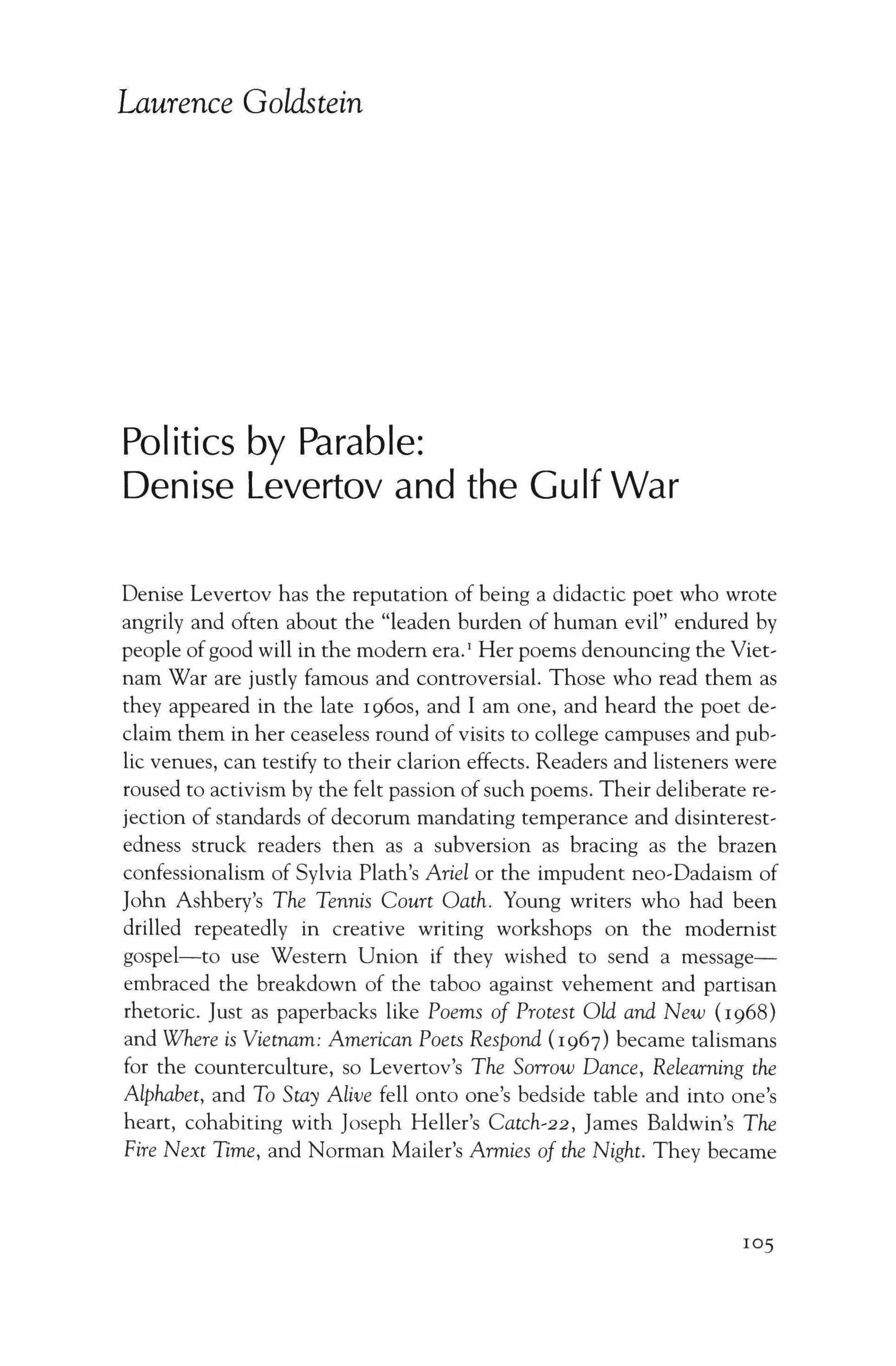
Politics by Parable:
Denise Levertov and the Gulf War
Denise Levertov has the reputation of being a didactic poet who wrote angrily and often about the "leaden burden of human evil" endured by people ofgood will in the modem era. I Her poems denouncing the Viet' nam War are justly famous and controversial. Those who read them as they appeared in the late 1960s, and I am one, and heard the poet de, claim them in her ceaseless round of visits to college campuses and pub, lic venues, can testify to their clarion effects. Readers and listeners were roused to activism by the felt passion of such poems. Their deliberate rejection of standards of decorum mandating temperance and disinterest' edness struck readers then as a subversion as bracing as the brazen confessionalism of Sylvia Plath's Ariel or the impudent nee-Dadaism of John Ashbery's The Tennis Court Oath. Young writers who had been drilled repeatedly in creative writing workshops on the modernist gospel-to use Western Union if they wished to send a messageembraced the breakdown of the taboo against vehement and partisan rhetoric. Just as paperbacks like Poems of Protest Old and New (1968) and Where is Vietnam: American Poets Respond (1967) became talismans for the counterculture, so Levertov's The Sorrow Dance, Relearning the Alphabet, and To Stay Alive fell onto one's bedside table and into one's heart, cohabiting with Joseph Heller's Catch-aa, James Baldwin's The Fire Next Time, and Norman Mailer's Armies of the Night. They became 105
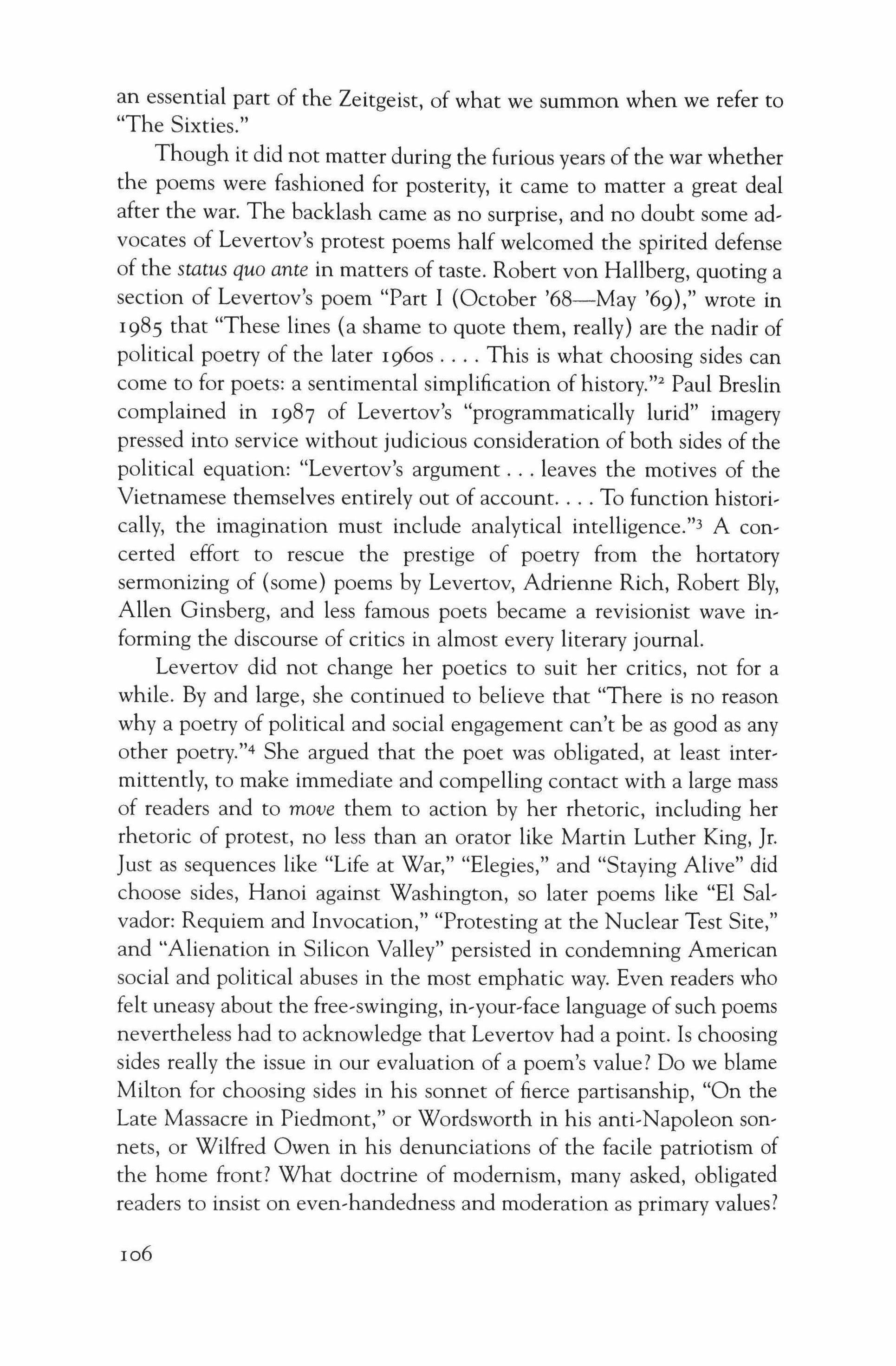
an essential part of the Zeitgeist, of what we summon when we refer to "The Sixties."
Though it did not matter during the furious years of the war whether the poems were fashioned for posterity, it came to matter a great deal after the war. The backlash came as no surprise, and no doubt some advocates of Levertov's protest poems half welcomed the spirited defense of the status quo ante in matters of taste. Robert von Hallberg, quoting a section of Levertov's poem "Part I (October '68-May '69)," wrote in 1985 that "These lines (a shame to quote them, really) are the nadir of political poetry of the later 1960s This is what choosing sides can come to for poets: a sentimental simplification of history." Paul Breslin complained in 1987 of Levertov's "programmatically lurid" imagery pressed into service without judicious consideration of both sides of the political equation: "Levertov's argument leaves the motives of the Vietnamese themselves entirely out of account To function historically, the imagination must include analytical intelligence."> A concerted effort to rescue the prestige of poetry from the hortatory sermonizing of (some) poems by Levertov, Adrienne Rich, Robert Bly, Allen Ginsberg, and less famous poets became a revisionist wave informing the discourse of critics in almost every literary journal.
Levertov did not change her poetics to suit her critics, not for a while. By and large, she continued to believe that "There is no reason why a poetry of political and social engagement can't be as good as any other poetry."4 She argued that the poet was obligated, at least intermittently, to make immediate and compelling contact with a large mass of readers and to move them to action by her rhetoric, including her rhetoric of protest, no less than an orator like Martin Luther King, Jr. Just as sequences like "Life at War," "Elegies," and "Staying Alive" did choose sides, Hanoi against Washington, so later poems like "EI Salvador: Requiem and Invocation," "Protesting at the Nuclear Test Site," and "Alienation in Silicon Valley" persisted in condemning American social and political abuses in the most emphatic way. Even readers who felt uneasy about the free-swinging, in-your-face language of such poems nevertheless had to acknowledge that Levertov had a point. Is choosing sides really the issue in our evaluation of a poem's value? Do we blame Milton for choosing sides in his sonnet of fierce partisanship, "On the Late Massacre in Piedmont," or Wordsworth in his anti-Napoleon sonnets, or Wilfred Owen in his denunciations of the facile patriotism of the home front? What doctrine of modernism, many asked, obligated readers to insist on even-handedness and moderation as primary values?
106
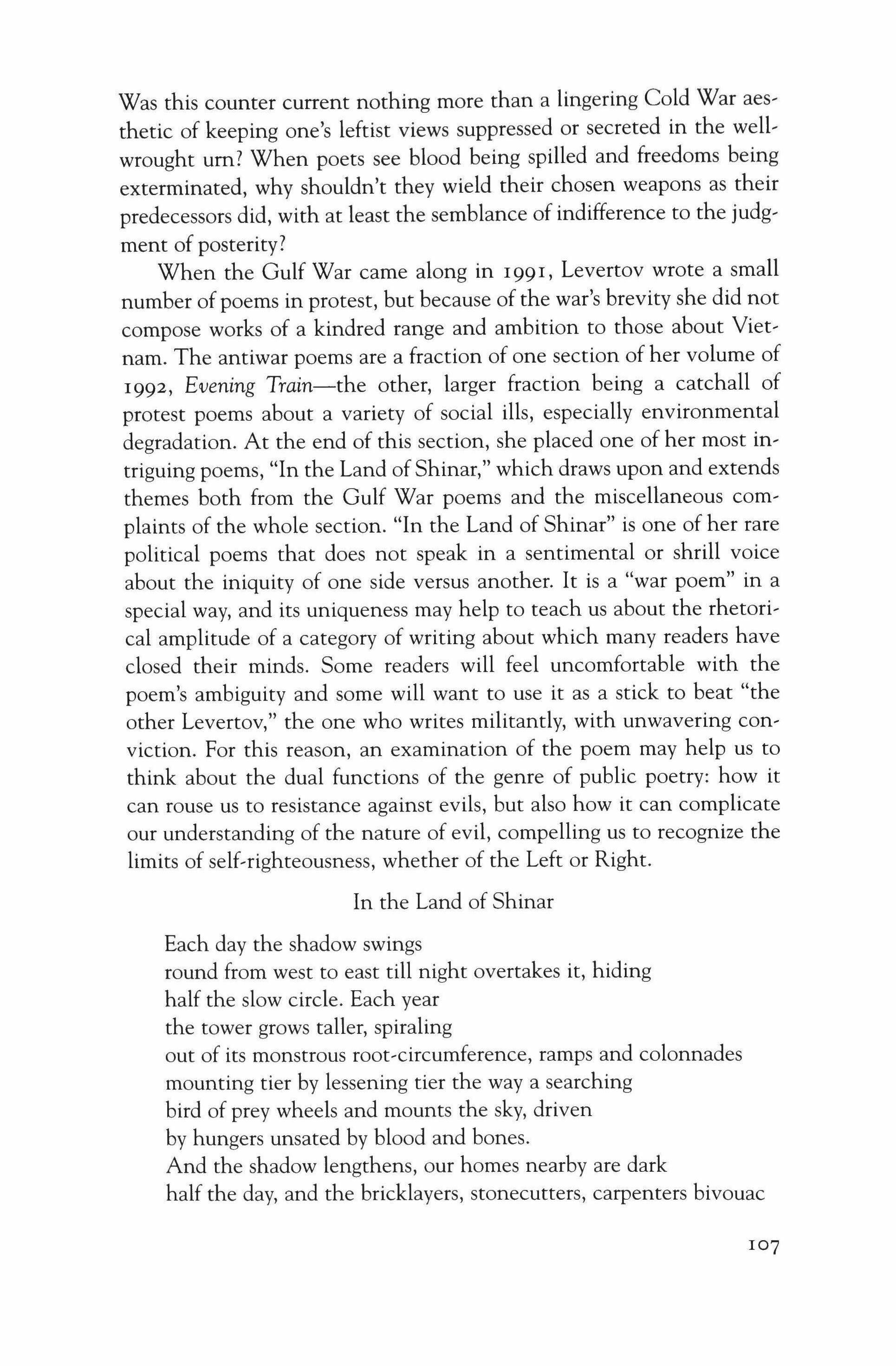
Was this counter current nothing more than a lingering Cold War aesthetic of keeping one's leftist views suppressed or secreted in the wellwrought urn? When poets see blood being spilled and freedoms being exterminated, why shouldn't they wield their chosen weapons as their predecessors did, with at least the semblance of indifference to the judgment of posterity?
When the Gulf War came along in I99I, Levertov wrote a small number of poems in protest, but because of the war's brevity she did not compose works of a kindred range and ambition to those about Vietnam. The antiwar poems are a fraction of one section of her volume of I992, Evening Train-the other, larger fraction being a catchall of protest poems about a variety of social ills, especially environmental degradation. At the end of this section, she placed one of her most intriguing poems, "In the Land of Shinar," which draws upon and extends themes both from the Gulf War poems and the miscellaneous cornplaints of the whole section. "In the Land of Shinar" is one of her rare political poems that does not speak in a sentimental or shrill voice about the iniquity of one side versus another. It is a "war poem" in a special way, and its uniqueness may help to teach us about the rhetorical amplitude of a category of writing about which many readers have closed their minds. Some readers will feel uncomfortable with the poem's ambiguity and some will want to use it as a stick to beat "the other Levertov," the one who writes militantly, with unwavering conviction. For this reason, an examination of the poem may help us to think about the dual functions of the genre of public poetry: how it can rouse us to resistance against evils, but also how it can complicate our understanding of the nature of evil, compelling us to recognize the limits of self-righteousness, whether of the Left or Right.
In the Land of Shinar
Each day the shadow swings round from west to east till night overtakes it, hiding half the slow circle. Each year the tower grows taller, spiraling out of its monstrous root-circumference, ramps and colonnades mounting tier by lessening tier the way a searching bird of prey wheels and mounts the sky, driven by hungers unsated by blood and bones. And the shadow lengthens, our homes nearby are dark half the day, and the bricklayers, stonecutters, carpenters bivouac
I07
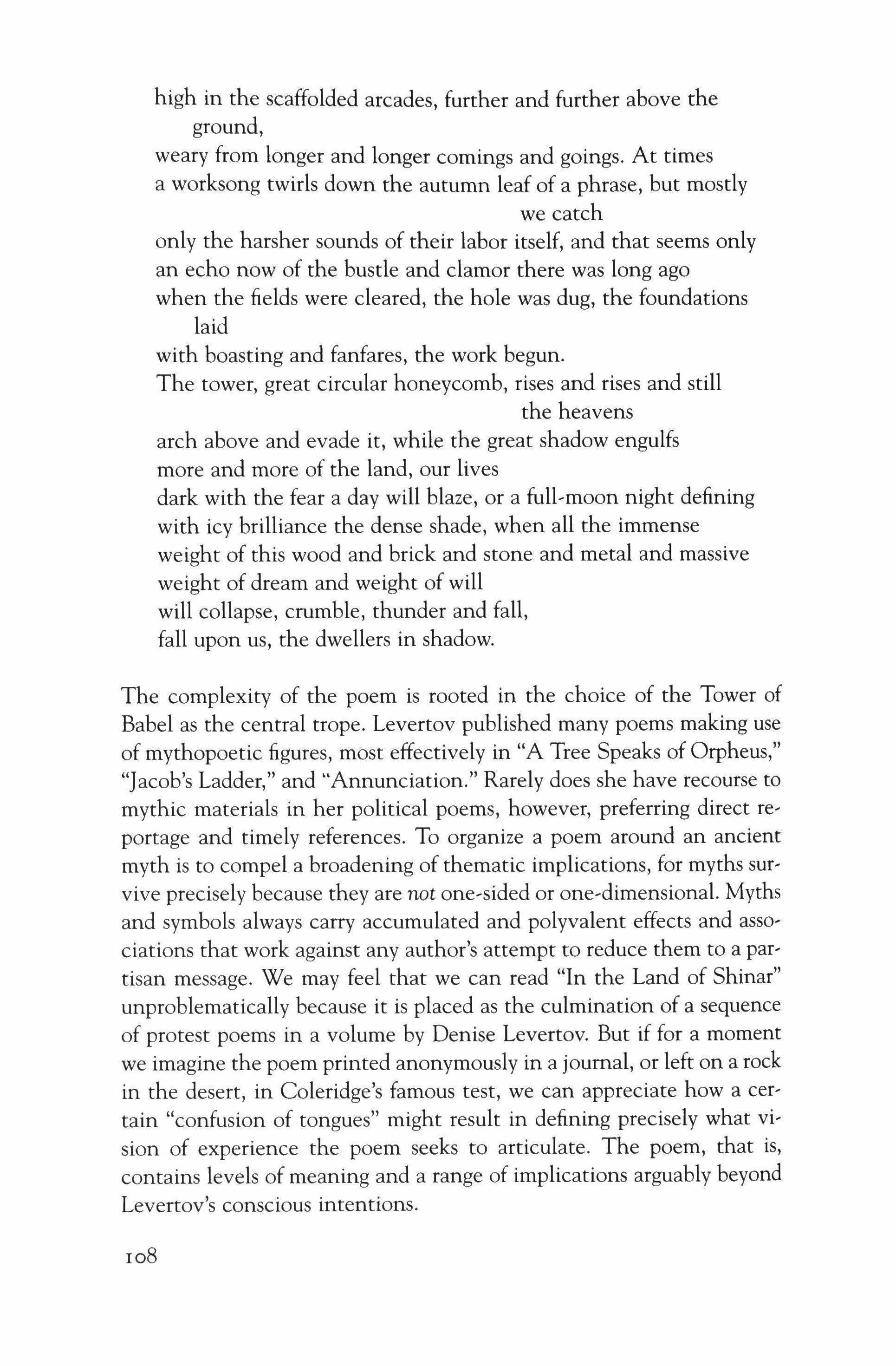
high in the scaffolded arcades, further and further above the ground, weary from longer and longer comings and goings. At times a worksong twirls down the autumn leaf of a phrase, but mostly we catch only the harsher sounds of their labor itself, and that seems only an echo now of the bustle and clamor there was long ago when the fields were cleared, the hole was dug, the foundations laid with boasting and fanfares, the work begun. The tower, great circular honeycomb, rises and rises and still the heavens arch above and evade it, while the great shadow engulfs more and more of the land, our lives dark with the fear a day will blaze, or a full-moon night defining with icy brilliance the dense shade, when all the immense weight of this wood and brick and stone and metal and massive weight of dream and weight of will will collapse, crumble, thunder and fall, fall upon us, the dwellers in shadow.
The complexity of the poem is rooted in the choice of the Tower of Babel as the central trope. Levertov published many poems making use of mythopoetic figures, most effectively in "A Tree Speaks of Orpheus," "Jacob's Ladder," and "Annunciation." Rarely does she have recourse to mythic materials in her political poems, however, preferring direct reportage and timely references. To organize a poem around an ancient myth is to compel a broadening of thematic implications, for myths survive precisely because they are not one-sided or one-dimensional. Myths and symbols always carry accumulated and polyvalent effects and associations that work against any author's attempt to reduce them to a partisan message. We may feel that we can read "In the Land of Shinar" unproblematically because it is placed as the culmination of a sequence of protest poems in a volume by Denise Levertov. But if for a moment we imagine the poem printed anonymously in a journal, or left on a rock in the desert, in Coleridge's famous test, we can appreciate how a certain "confusion of tongues" might result in defining precisely what vision of experience the poem seeks to articulate. The poem, that is, contains levels of meaning and a range of implications arguably beyond Levertov's conscious intentions.
108
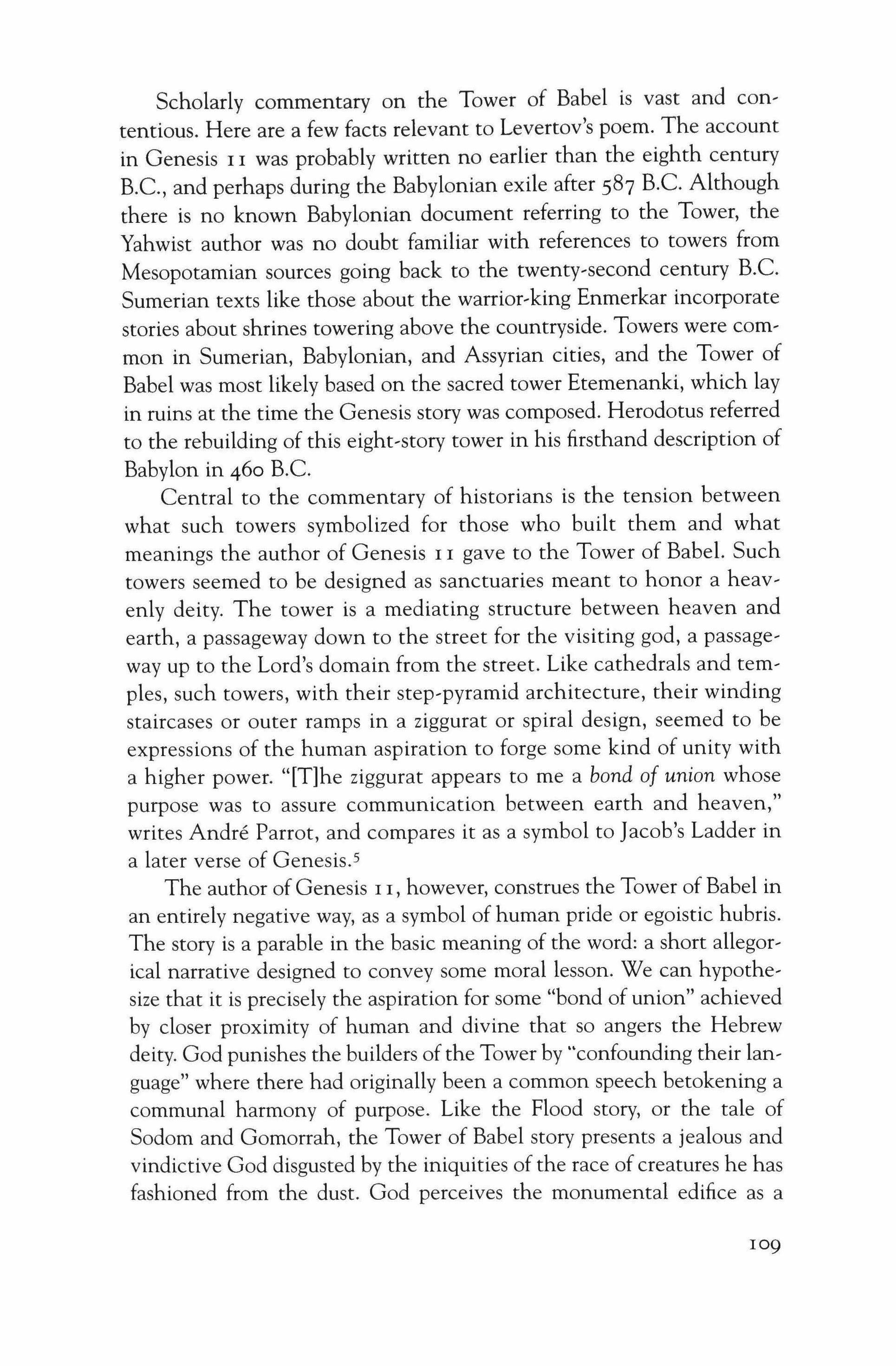
Scholarly commentary on the Tower of Babel is vast and contentious. Here are a few facts relevant to Levertov's poem. The account in Genesis I I was probably written no earlier than the eighth century B.C., and perhaps during the Babylonian exile after 587 B.C. Although there is no known Babylonian document referring to the Tower, the Yahwist author was no doubt familiar with references to towers from Mesopotamian sources going back to the twenty-second century B.C. Sumerian texts like those about the warrior-king Enmerkar incorporate stories about shrines towering above the countryside. Towers were cornmon in Sumerian, Babylonian, and Assyrian cities, and the Tower of Babel was most likely based on the sacred tower Etemenanki, which lay in ruins at the time the Genesis story was composed. Herodotus referred to the rebuilding of this eight-story tower in his firsthand description of Babylon in 460 B.C.
Central to the commentary of historians is the tension between what such towers symbolized for those who built them and what meanings the author of Genesis I I gave to the Tower of Babel. Such towers seemed to be designed as sanctuaries meant to honor a heavenly deity. The tower is a mediating structure between heaven and earth, a passageway down to the street for the visiting god, a passageway up to the Lord's domain from the street. Like cathedrals and ternples, such towers, with their step-pyramid architecture, their winding staircases or outer ramps in a ziggurat or spiral design, seemed to be expressions of the human aspiration to forge some kind of unity with a higher power. "[T]he ziggurat appears to me a bond of union whose purpose was to assure communication between earth and heaven," writes Andre Parrot, and compares it as a symbol to Jacob's Ladder in a later verse of Genesis."
The author of Genesis II, however, construes the Tower of Babel in an entirely negative way, as a symbol of human pride or egoistic hubris. The story is a parable in the basic meaning of the word: a short allegorical narrative designed to convey some moral lesson. We can hypothesize that it is precisely the aspiration for some "bond of union" achieved by closer proximity of human and divine that so angers the Hebrew deity. God punishes the builders of the Tower by "confounding their language" where there had originally been a common speech betokening a communal harmony of purpose. Like the Flood story, or the tale of Sodom and Gomorrah, the Tower of Babel story presents a jealous and vindictive God disgusted by the iniquities of the race of creatures he has fashioned from the dust. God perceives the monumental edifice as a
109
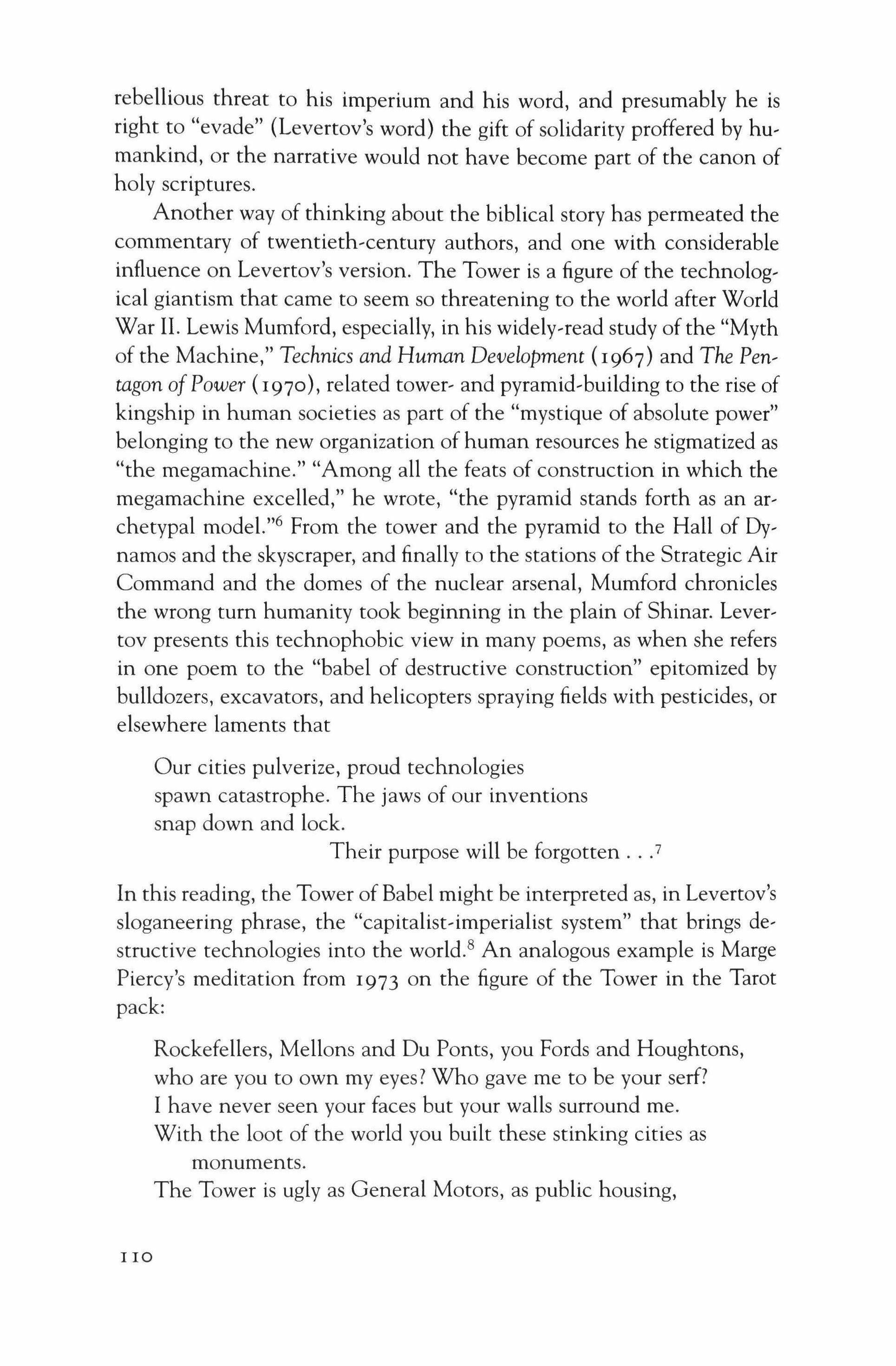
rebellious threat to his imperium and his word, and presumably he is right to "evade" (Levertov's word) the gift of solidarity proffered by humankind, or the narrative would not have become part of the canon of holy scriptures.
Another way of thinking about the biblical story has permeated the commentary of twentieth-century authors, and one with considerable influence on Levertov's version. The Tower is a figure of the technological giantism that came to seem so threatening to the world after World War II. Lewis Mumford, especially, in his widely-read study of the "Myth of the Machine," Technics and Human Development (1967) and The Pentagon of Power (1970), related tower- and pyramid-building to the rise of kingship in human societies as part of the "mystique of absolute power" belonging to the new organization of human resources he stigmatized as "the megamachine." "Among all the feats of construction in which the megamachine excelled," he wrote, "the pyramid stands forth as an archetypal model."? From the tower and the pyramid to the Hall of Dynamos and the skyscraper, and finally to the stations of the Strategic Air Command and the domes of the nuclear arsenal, Mumford chronicles the wrong turn humanity took beginning in the plain of Shinar. Levertov presents this technophobic view in many poems, as when she refers in one poem to the "babel of destructive construction" epitomized by bulldozers, excavators, and helicopters spraying fields with pesticides, or elsewhere laments that
Our cities pulverize, proud technologies spawn catastrophe. The jaws of our inventions snap down and lock.
Their purpose will be forgotten 7
In this reading, the Tower of Babel might be interpreted as, in Levertov's sloganeering phrase, the "capitalist-imperialist system" that brings destructive technologies into the world." An analogous example is Marge Piercy's meditation from 1973 on the figure of the Tower in the Tarot pack:
Rockefellers, Mellons and Du Ponts, you Fords and Houghtons, who are you to own my eyes? Who gave me to be your serf? I have never seen your faces but your walls surround me. With the loot of the world you built these stinking cities as monuments.
The Tower is ugly as General Motors, as public housing,
110
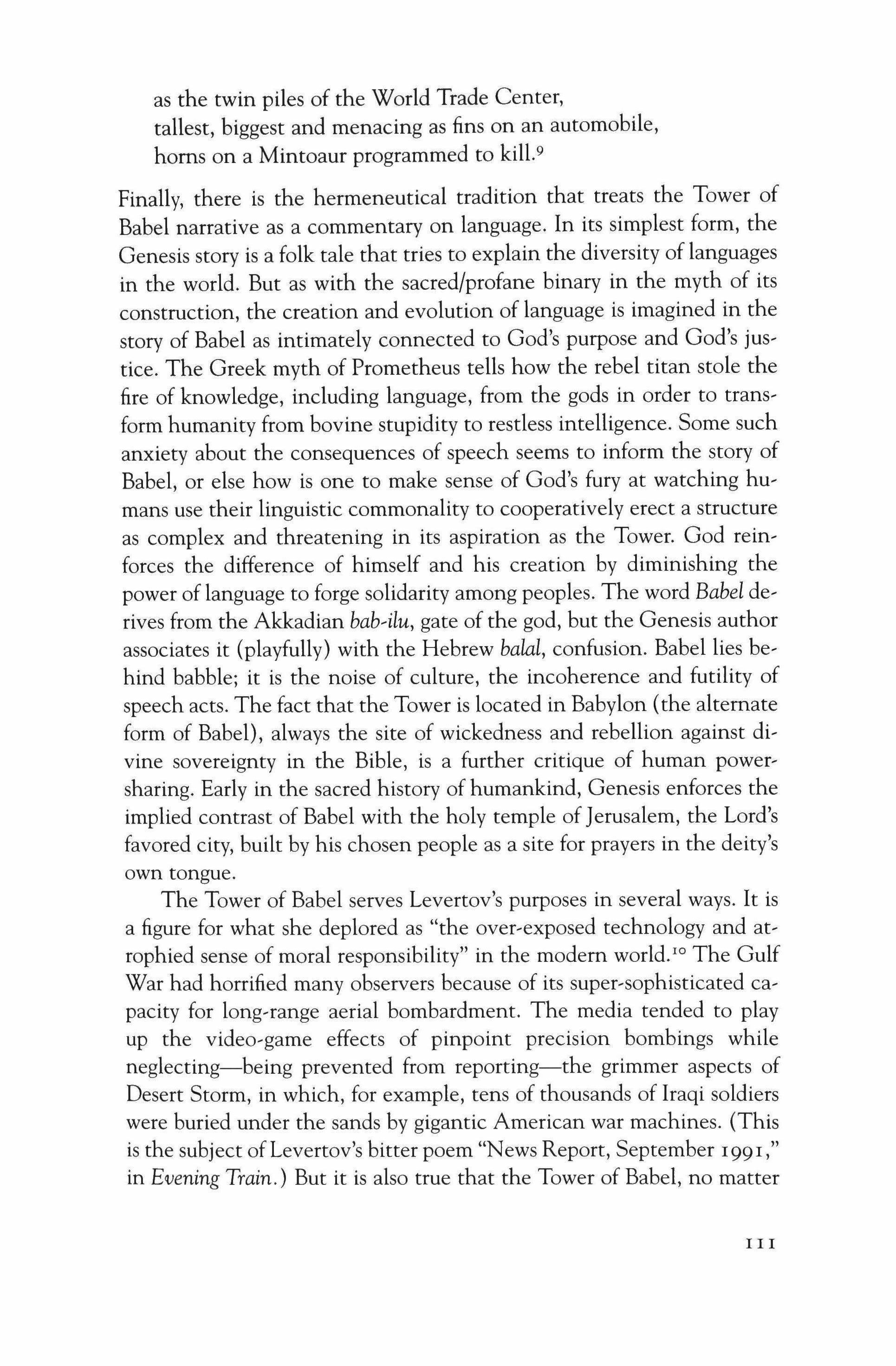
as the twin piles of the World Trade Center, tallest, biggest and menacing as fins on an automobile, horns on a Mintoaur programmed to kill.?
Finally, there is the hermeneutical tradition that treats the Tower of Babel narrative as a commentary on language. In its simplest form, the Genesis story is a folk tale that tries to explain the diversity of languages in the world. But as with the sacred/profane binary in the myth of its construction, the creation and evolution of language is imagined in the story of Babel as intimately connected to God's purpose and God's justice. The Greek myth of Prometheus tells how the rebel titan stole the fire of knowledge, including language, from the gods in order to transform humanity from bovine stupidity to restless intelligence. Some such anxiety about the consequences of speech seems to inform the story of Babel, or else how is one to make sense of God's fury at watching humans use their linguistic commonality to cooperatively erect a structure as complex and threatening in its aspiration as the Tower. God reinforces the difference of himself and his creation by diminishing the power of language to forge solidarity among peoples. The word Babel derives from the Akkadian bab-ilu, gate of the god, but the Genesis author associates it (playfully) with the Hebrew balal, confusion. Babel lies behind babble; it is the noise of culture, the incoherence and futility of speech acts. The fact that the Tower is located in Babylon (the alternate form of Babel), always the site of wickedness and rebellion against divine sovereignty in the Bible, is a further critique of human powersharing. Early in the sacred history of humankind, Genesis enforces the implied contrast of Babel with the holy temple of Jerusalem, the Lord's favored city, built by his chosen people as a site for prayers in the deity's own tongue.
The Tower of Babel serves Levertov's purposes in several ways. It is a figure for what she deplored as "the over-exposed technology and atrophied sense of moral responsibility" in the modem world.:" The Gulf War had horrified many observers because of its super-sophisticated capacity for long-range aerial bombardment. The media tended to play up the video-game effects of pinpoint precision bombings while neglecting-being prevented from reporting-the grimmer aspects of Desert Storm, in which, for example, tens of thousands of Iraqi soldiers were buried under the sands by gigantic American war machines. (This is the subject ofLevertov's bitter poem "News Report, September 1991," in Evening Train.) But it is also true that the Tower of Babel, no matter
III
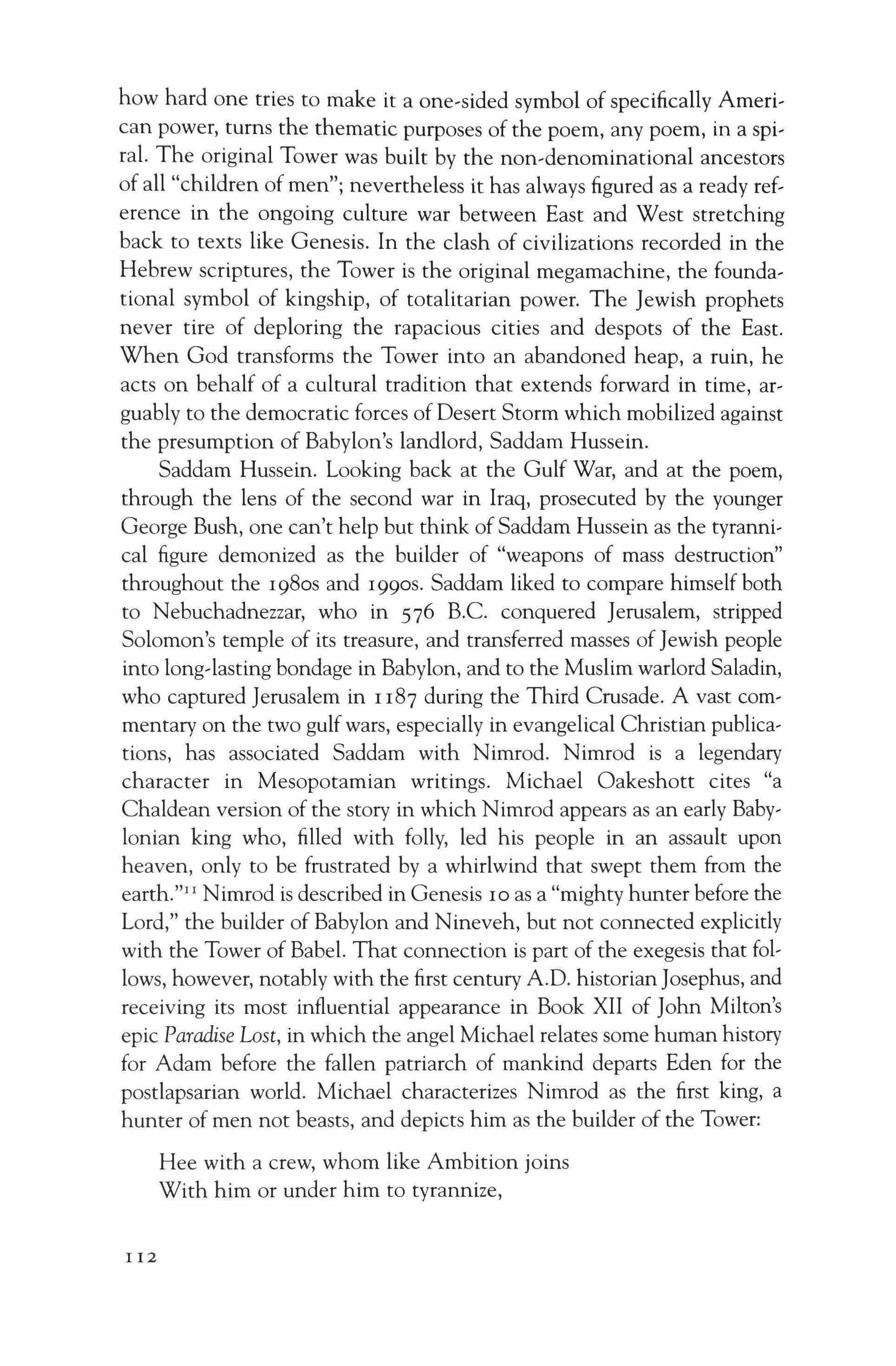
how hard one tries to make it a one-sided symbol of specifically American power, turns the thematic purposes of the poem, any poem, in a spiral. The original Tower was built by the non-denominational ancestors of all "children of men"; nevertheless it has always figured as a ready reference in the ongoing culture war between East and West stretching back to texts like Genesis. In the clash of civilizations recorded in the Hebrew scriptures, the Tower is the original megamachine, the foundational symbol of kingship, of totalitarian power. The Jewish prophets never tire of deploring the rapacious cities and despots of the East. When God transforms the Tower into an abandoned heap, a ruin, he acts on behalf of a cultural tradition that extends forward in time, arguably to the democratic forces of Desert Storm which mobilized against the presumption of Babylon's landlord, Saddam Hussein.
Saddam Hussein. Looking back at the Gulf War, and at the poem, through the lens of the second war in Iraq, prosecuted by the younger George Bush, one can't help but think of Saddam Hussein as the tyrannical figure demonized as the builder of "weapons of mass destruction" throughout the I980s and I990S. Saddam liked to compare himself both to Nebuchadnezzar, who in 576 B.C. conquered Jerusalem, stripped Solomon's temple of its treasure, and transferred masses of Jewish people into long-lasting bondage in Babylon, and to the Muslim warlord Saladin, who captured Jerusalem in 1187 during the Third Crusade. A vast commentary on the two gulf wars, especially in evangelical Christian publications, has associated Saddam with Nimrod. Nimrod is a legendary character in Mesopotamian writings. Michael Oakeshott cites "a Chaldean version of the story in which Nimrod appears as an early Babylonian king who, filled with folly, led his people in an assault upon heaven, only to be frustrated by a whirlwind that swept them from the earth."!' Nimrod is described in Genesis 10 as a "mighty hunter before the Lord," the builder of Babylon and Nineveh, but not connected explicitly with the Tower of Babel. That connection is part of the exegesis that follows, however, notably with the first century A.D. historian Josephus, and receiving its most influential appearance in Book XII of John Milton's epic Paradise Lost, in which the angel Michael relates some human history for Adam before the fallen patriarch of mankind departs Eden for the postlapsarian world. Michael characterizes Nimrod as the first king, a hunter of men not beasts, and depicts him as the builder of the Tower:
Hee with a crew, whom like Ambition joins With him or under him to tyrannize,
112
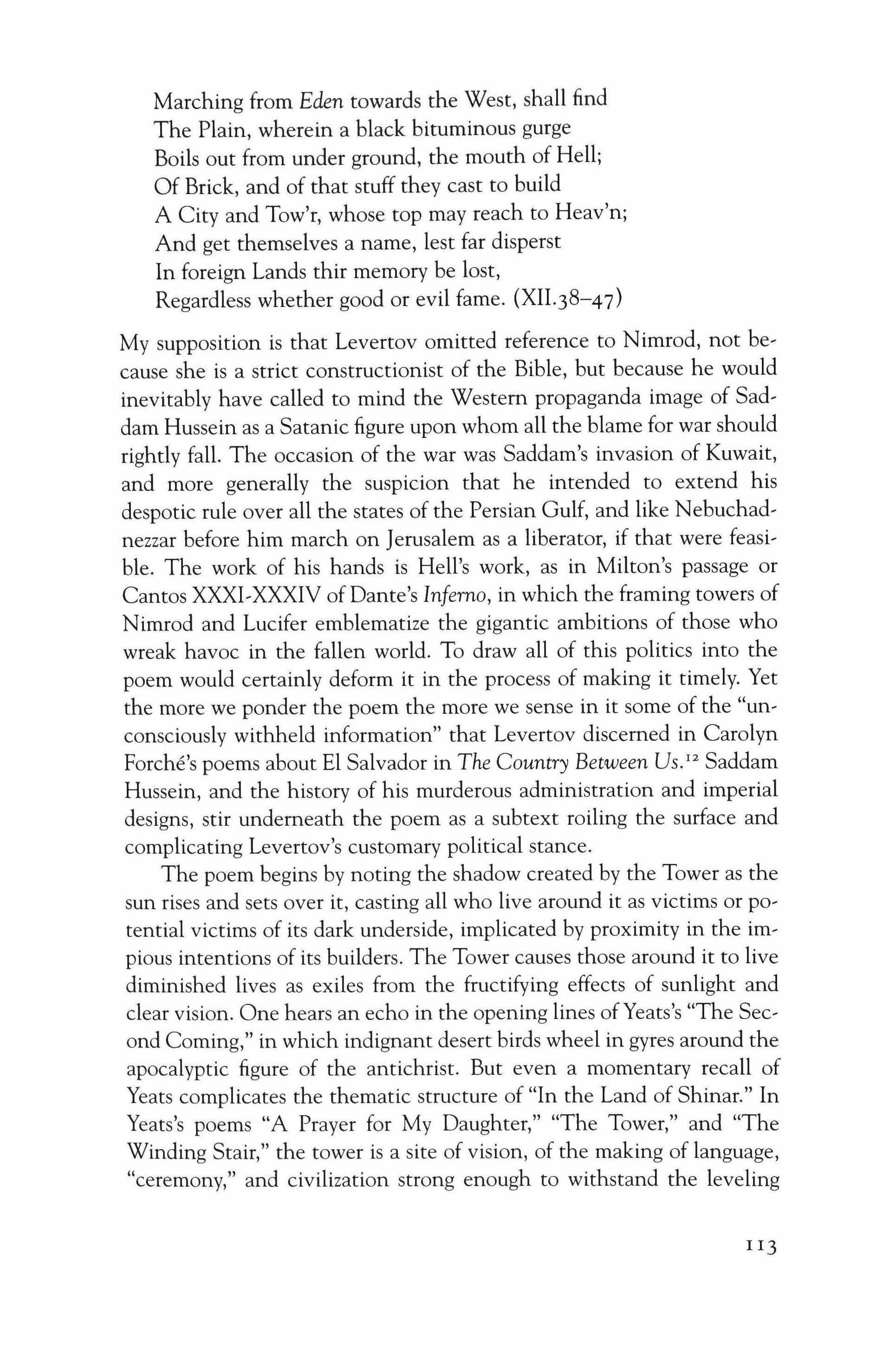
Marching from Eden towards the West, shall find The Plain, wherein a black bituminous gurge Boils out from under ground, the mouth of Hell; Of Brick, and of that stuff they cast to build A City and Tow'r, whose top may reach to Heav'n; And get themselves a name, lest far disperst In foreign Lands thir memory be lost, Regardless whether good or evil fame. (XII.38-47)
My supposition is that Levertov omitted reference to Nimrod, not because she is a strict constructionist of the Bible, but because he would inevitably have called to mind the Western propaganda image of Saddam Hussein as a Satanic figure upon whom all the blame for war should rightly fall. The occasion of the war was Saddam's invasion of Kuwait, and more generally the suspicion that he intended to extend his despotic rule over all the states of the Persian Gulf, and like Nebuchadnezzar before him march on Jerusalem as a liberator, if that were feasible. The work of his hands is Hell's work, as in Milton's passage or Cantos XXXI�XXXIV of Dante's Inferno, in which the framing towers of Nimrod and Lucifer emblematize the gigantic ambitions of those who wreak havoc in the fallen world. To draw all of this politics into the poem would certainly deform it in the process of making it timely. Yet the more we ponder the poem the more we sense in it some of the "unconsciously withheld information" that Levertov discerned in Carolyn Forche's poems about El Salvador in The Country Between US.12 Saddam Hussein, and the history of his murderous administration and imperial designs, stir underneath the poem as a subtext roiling the surface and complicating Levertov's customary political stance.
The poem begins by noting the shadow created by the Tower as the sun rises and sets over it, casting all who live around it as victims or potential victims of its dark underside, implicated by proximity in the impious intentions of its builders. The Tower causes those around it to live diminished lives as exiles from the fructifying effects of sunlight and clear vision. One hears an echo in the opening lines of Yeats's "The Second Coming," in which indignant desert birds wheel in gyres around the apocalyptic figure of the antichrist. But even a momentary recall of Yeats complicates the thematic structure of "In the Land of Shinar." In Yeats's poems "A Prayer for My Daughter," "The Tower," and "The Winding Stair," the tower is a site of vision, of the making of language, "ceremony," and civilization strong enough to withstand the leveling
113
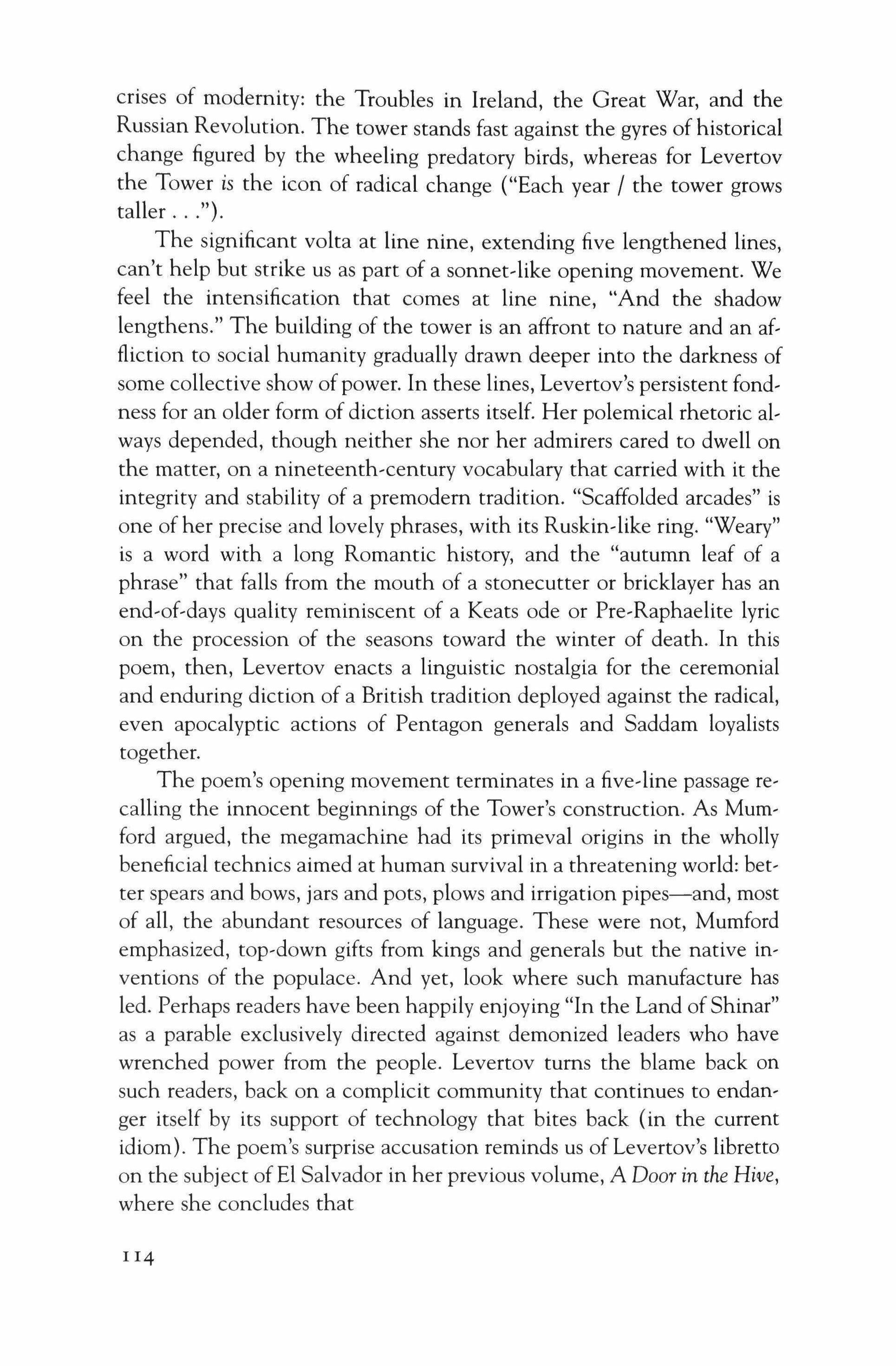
crises of modernity: the Troubles in Ireland, the Great War, and the Russian Revolution. The tower stands fast against the gyres of historical change figured by the wheeling predatory birds, whereas for Levertov the Tower is the icon of radical change {"Each year / the tower grows taller ").
The significant volta at line nine, extending five lengthened lines, can't help but strike us as part of a sonnet,like opening movement. We feel the intensification that comes at line nine, "And the shadow lengthens." The building of the tower is an affront to nature and an affliction to social humanity gradually drawn deeper into the darkness of some collective show of power. In these lines, Levertov's persistent fond, ness for an older form of diction asserts itself. Her polemical rhetoric always depended, though neither she nor her admirers cared to dwell on the matter, on a nineteenth,century vocabulary that carried with it the integrity and stability of a premodern tradition. "Scaffolded arcades" is one of her precise and lovely phrases, with its Ruskin-like ring. "Weary" is a word with a long Romantic history, and the "autumn leaf of a phrase" that falls from the mouth of a stonecutter or bricklayer has an end-of-days quality reminiscent of a Keats ode or Pre-Raphaelite lyric on the procession of the seasons toward the winter of death. In this poem, then, Levertov enacts a linguistic nostalgia for the ceremonial and enduring diction of a British tradition deployed against the radical, even apocalyptic actions of Pentagon generals and Saddam loyalists together.
The poem's opening movement terminates in a five,line passage recalling the innocent beginnings of the Tower's construction. As Mum, ford argued, the megamachine had its primeval origins in the wholly beneficial technics aimed at human survival in a threatening world: bet' ter spears and bows, jars and pots, plows and irrigation pipes-and, most of all, the abundant resources of language. These were not, Mumford emphasized, top'down gifts from kings and generals but the native in' ventions of the populace. And yet, look where such manufacture has led. Perhaps readers have been happily enjoying "In the Land ofShinar" as a parable exclusively directed against demonized leaders who have wrenched power from the people. Levertov turns the blame back on such readers, back on a complicit community that continues to endanger itself by its support of technology that bites back (in the current idiom). The poem's surprise accusation reminds us of Levertov's libretto on the subject of EI Salvador in her previous volume, A Door in the Hive, where she concludes that
114
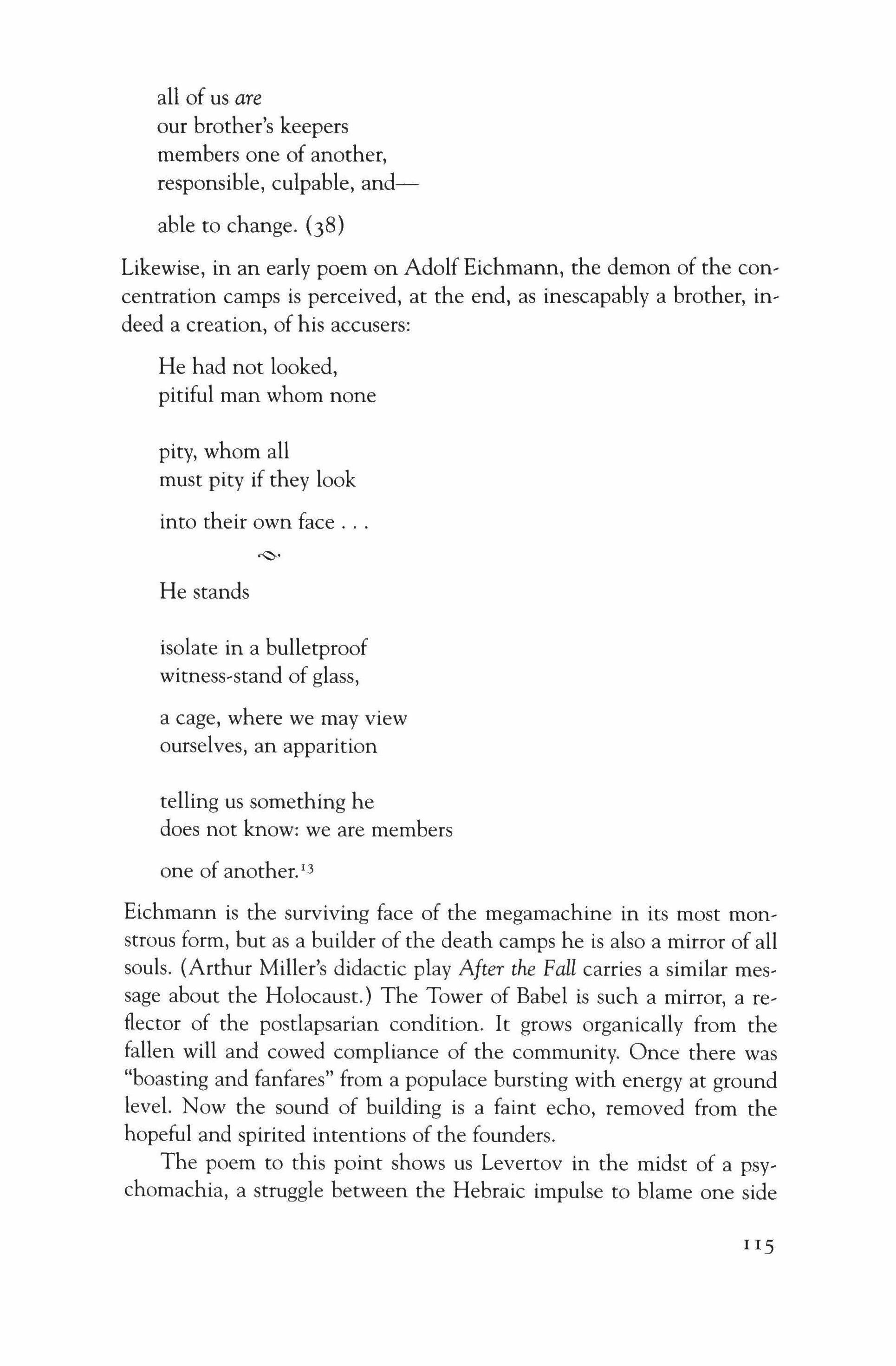
all of us are our brother's keepers members one of another, responsible, culpable, andable to change. (38)
Likewise, in an early poem on Adolf Eichmann, the demon of the concentration camps is perceived, at the end, as inescapably a brother, indeed a creation, of his accusers:
He had not looked, pitiful man whom none pity, whom all must pity if they look into their own face
He stands isolate in a bulletproof witness-stand of glass, a cage, where we may view ourselves, an apparition
telling us something he does not know: we are members one of another. 13
Eichmann is the surviving face of the megamachine in its most monstrous form, but as a builder of the death camps he is also a mirror of all souls. (Arthur Miller's didactic play After the Fall carries a similar message about the Holocaust.) The Tower of Babel is such a mirror, a reflector of the postlapsarian condition. It grows organically from the fallen will and cowed compliance of the community. Once there was "boasting and fanfares" from a populace bursting with energy at ground level. Now the sound of building is a faint echo, removed from the hopeful and spirited intentions of the founders.
The poem to this point shows us Levertov in the midst of a psychomachia, a struggle between the Hebraic impulse to blame one side
115
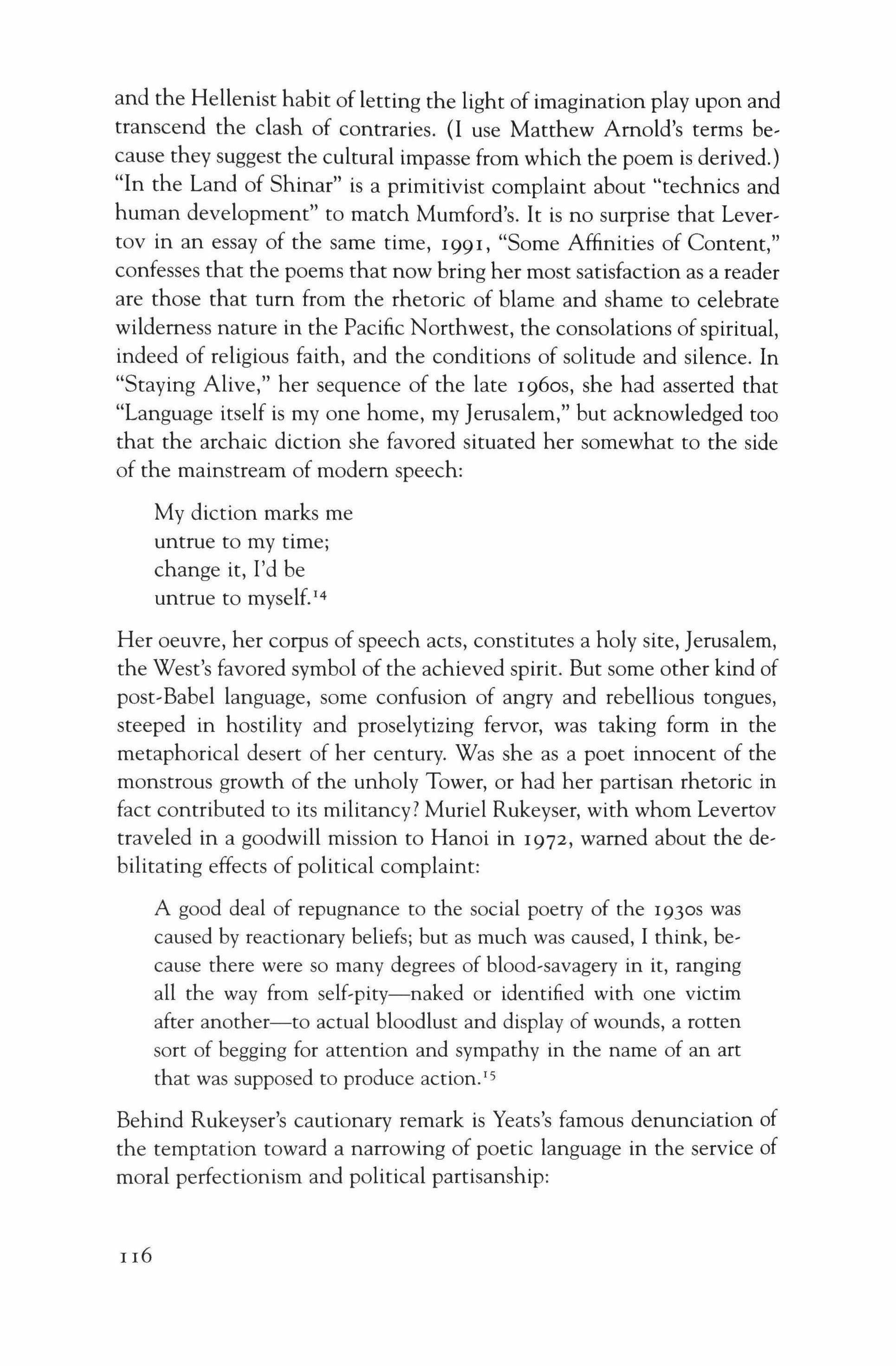
and the Hellenist habit of letting the light of imagination play upon and transcend the clash of contraries. (I use Matthew Arnold's terms because they suggest the cultural impasse from which the poem is derived.)
"In the Land of Shinar'' is a primitivist complaint about "technics and human development" to match Mumford's. It is no surprise that Levertov in an essay of the same time, 1991, "Some Affinities of Content," confesses that the poems that now bring her most satisfaction as a reader are those that tum from the rhetoric of blame and shame to celebrate wilderness nature in the Pacific Northwest, the consolations of spiritual, indeed of religious faith, and the conditions of solitude and silence. In "Staying Alive," her sequence of the late 1960s, she had asserted that "Language itself is my one home, my Jerusalem," but acknowledged too that the archaic diction she favored situated her somewhat to the side of the mainstream of modem speech:
My diction marks me untrue to my time; change it, I'd be untrue to myself. 14
Her oeuvre, her corpus of speech acts, constitutes a holy site, Jerusalem, the West's favored symbol of the achieved spirit. But some other kind of post-Babel language, some confusion of angry and rebellious tongues, steeped in hostility and proselytizing fervor, was taking form in the metaphorical desert of her century. Was she as a poet innocent of the monstrous growth of the unholy Tower, or had her partisan rhetoric in fact contributed to its militancy? Muriel Rukeyser, with whom Levertov traveled in a goodwill mission to Hanoi in 1972, warned about the debilitating effects of political complaint:
A good deal of repugnance to the social poetry of the 1930S was caused by reactionary beliefs; but as much was caused, I think, because there were so many degrees of blood-savagery in it, ranging all the way from se1f-pity-naked or identified with one victim after another-to actual bloodlust and display of wounds, a rotten sort of begging for attention and sympathy in the name of an art that was supposed to produce action. I 5
Behind Rukeyser's cautionary remark is Yeats's famous denunciation of the temptation toward a narrowing of poetic language in the service of moral perfectionism and political partisanship:
II6
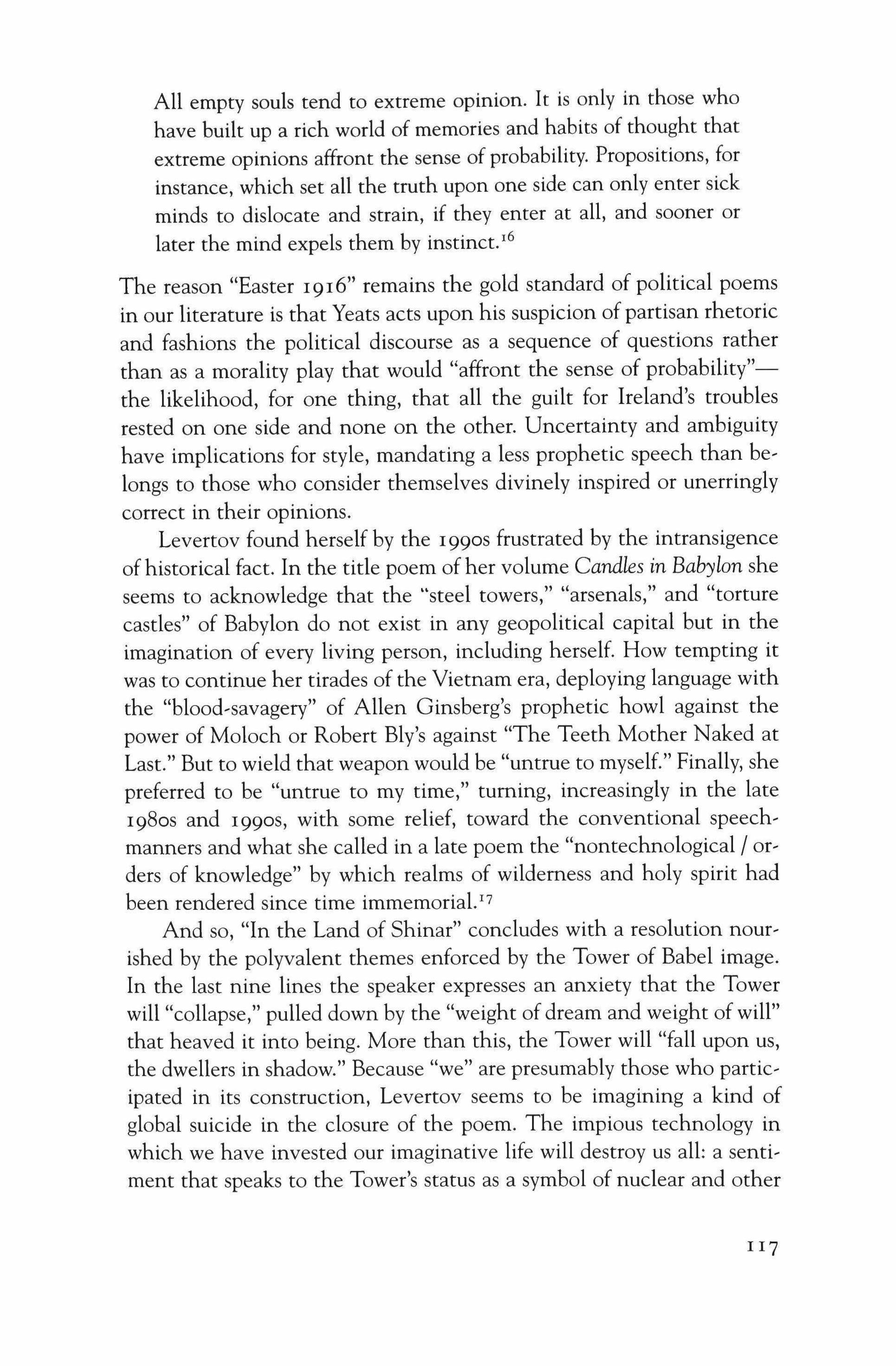
All empty souls tend to extreme opinion. It is only in those who have built up a rich world of memories and habits of thought that extreme opinions affront the sense of probability. Propositions, for instance, which set all the truth upon one side can only enter sick minds to dislocate and strain, if they enter at all, and sooner or later the mind expels them by instinct. 16
The reason "Easter 1916" remains the gold standard of political poems in our literature is that Yeats acts upon his suspicion of partisan rhetoric and fashions the political discourse as a sequence of questions rather than as a morality play that would "affront the sense of probability"the likelihood, for one thing, that all the guilt for Ireland's troubles rested on one side and none on the other. Uncertainty and ambiguity have implications for style, mandating a less prophetic speech than belongs to those who consider themselves divinely inspired or unerringly correct in their opinions.
Levertov found herself by the 1990S frustrated by the intransigence ofhistorical fact. In the title poem ofher volume Candles in Babylon she seems to acknowledge that the "steel towers," "arsenals," and "torture castles" of Babylon do not exist in any geopolitical capital but in the imagination of every living person, including herself. How tempting it was to continue her tirades of the Vietnam era, deploying language with the "blood-savagery" of Allen Ginsberg's prophetic howl against the power of Moloch or Robert Bly's against "The Teeth Mother Naked at Last." But to wield that weapon would be "untrue to myself." Finally, she preferred to be "untrue to my time," turning, increasingly in the late 1980s and 1990S, with some relief, toward the conventional speechmanners and what she called in a late poem the "nontechnological / orders of knowledge" by which realms of wilderness and holy spirit had been rendered since time immemorial. 17
And so, "In the Land of Shinar" concludes with a resolution nourished by the polyvalent themes enforced by the Tower of Babel image. In the last nine lines the speaker expresses an anxiety that the Tower will "collapse," pulled down by the "weight of dream and weight of will" that heaved it into being. More than this, the Tower will "fall upon us, the dwellers in shadow." Because "we" are presumably those who participated in its construction, Levertov seems to be imagining a kind of global suicide in the closure of the poem. The impious technology in which we have invested our imaginative life will destroy us all: a sentiment that speaks to the Tower's status as a symbol of nuclear and other
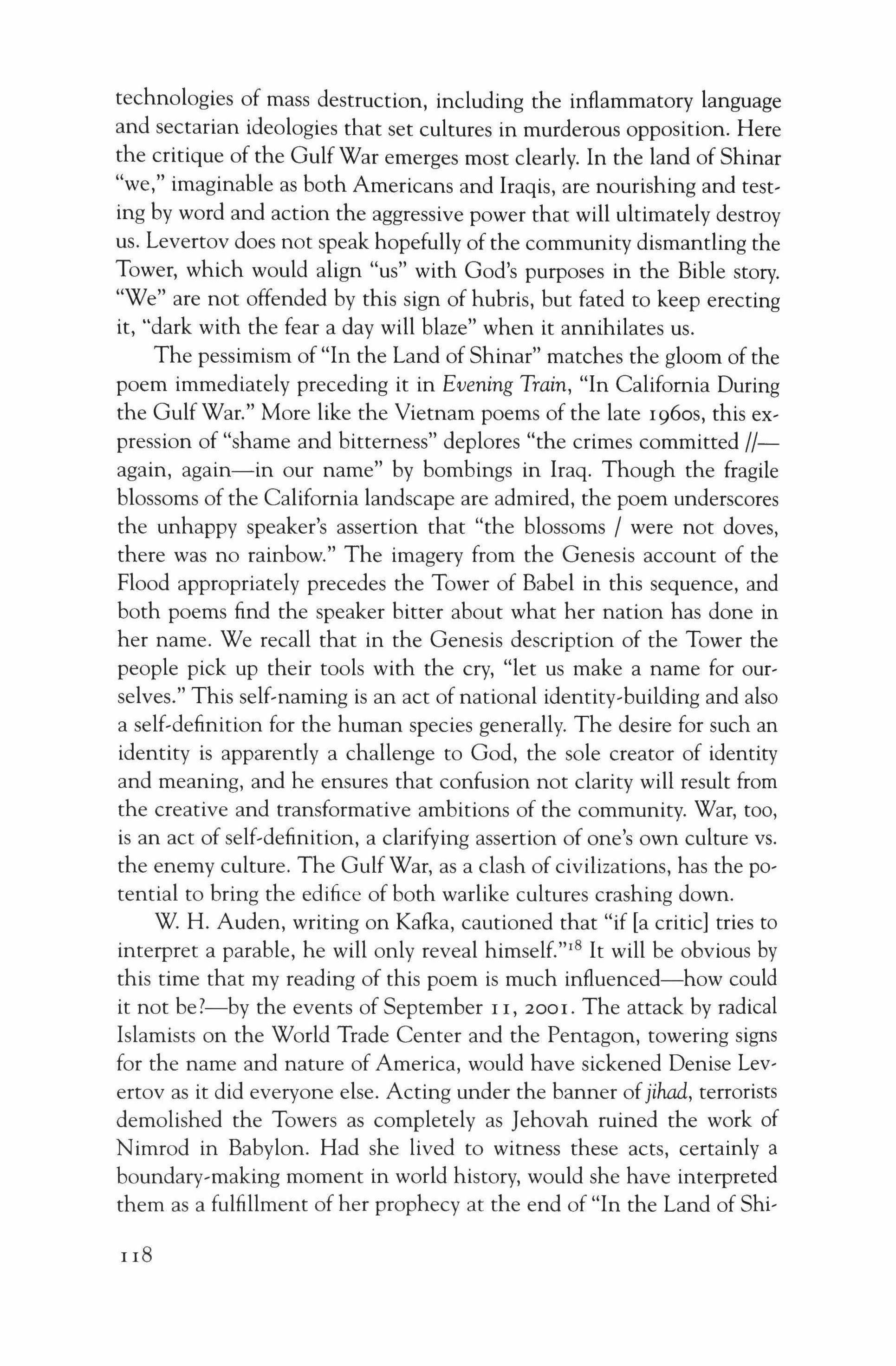
technologies of mass destruction, including the inflammatory language and sectarian ideologies that set cultures in murderous opposition. Here the critique of the Gulf War emerges most clearly. In the land of Shinar "we," imaginable as both Americans and Iraqis, are nourishing and testing by word and action the aggressive power that will ultimately destroy us. Levertov does not speak hopefully of the community dismantling the Tower, which would align "us" with God's purposes in the Bible story. "We" are not offended by this sign of hubris, but fated to keep erecting it, "dark with the fear a day will blaze" when it annihilates us.
The pessimism of "In the Land of Shinar" matches the gloom of the poem immediately preceding it in Evening Train, "In California During the Gulf War." More like the Vietnam poems of the late I960s, this expression of "shame and bitterness" deplores "the crimes committed //again, again-in our name" by bombings in Iraq. Though the fragile blossoms of the California landscape are admired, the poem underscores the unhappy speaker's assertion that "the blossoms / were not doves, there was no rainbow." The imagery from the Genesis account of the Flood appropriately precedes the Tower of Babel in this sequence, and both poems find the speaker bitter about what her nation has done in her name. We recall that in the Genesis description of the Tower the people pick up their tools with the cry, "let us make a name for ourselves." This self-naming is an act of national identity-building and also a self-definition for the human species generally. The desire for such an identity is apparently a challenge to God, the sole creator of identity and meaning, and he ensures that confusion not clarity will result from the creative and transformative ambitions of the community. War, too, is an act of self-definition, a clarifying assertion of one's own culture vs. the enemy culture. The Gulf War, as a clash of civilizations, has the potential to bring the edifice of both warlike cultures crashing down.
W. H. Auden, writing on Kafka, cautioned that "if [a critic] tries to interpret a parable, he will only reveal himself?" It will be obvious by this time that my reading of this poem is much influenced-how could it not bel-by the events of September I I, 2001. The attack by radical Islamists on the World Trade Center and the Pentagon, towering signs for the name and nature of America, would have sickened Denise Levertov as it did everyone else. Acting under the banner ofjihad, terrorists demolished the Towers as completely as Jehovah ruined the work of Nimrod in Babylon. Had she lived to witness these acts, certainly a boundary-making moment in world history, would she have interpreted them as a fulfillment of her prophecy at the end of "In the Land of Shi-
lIS
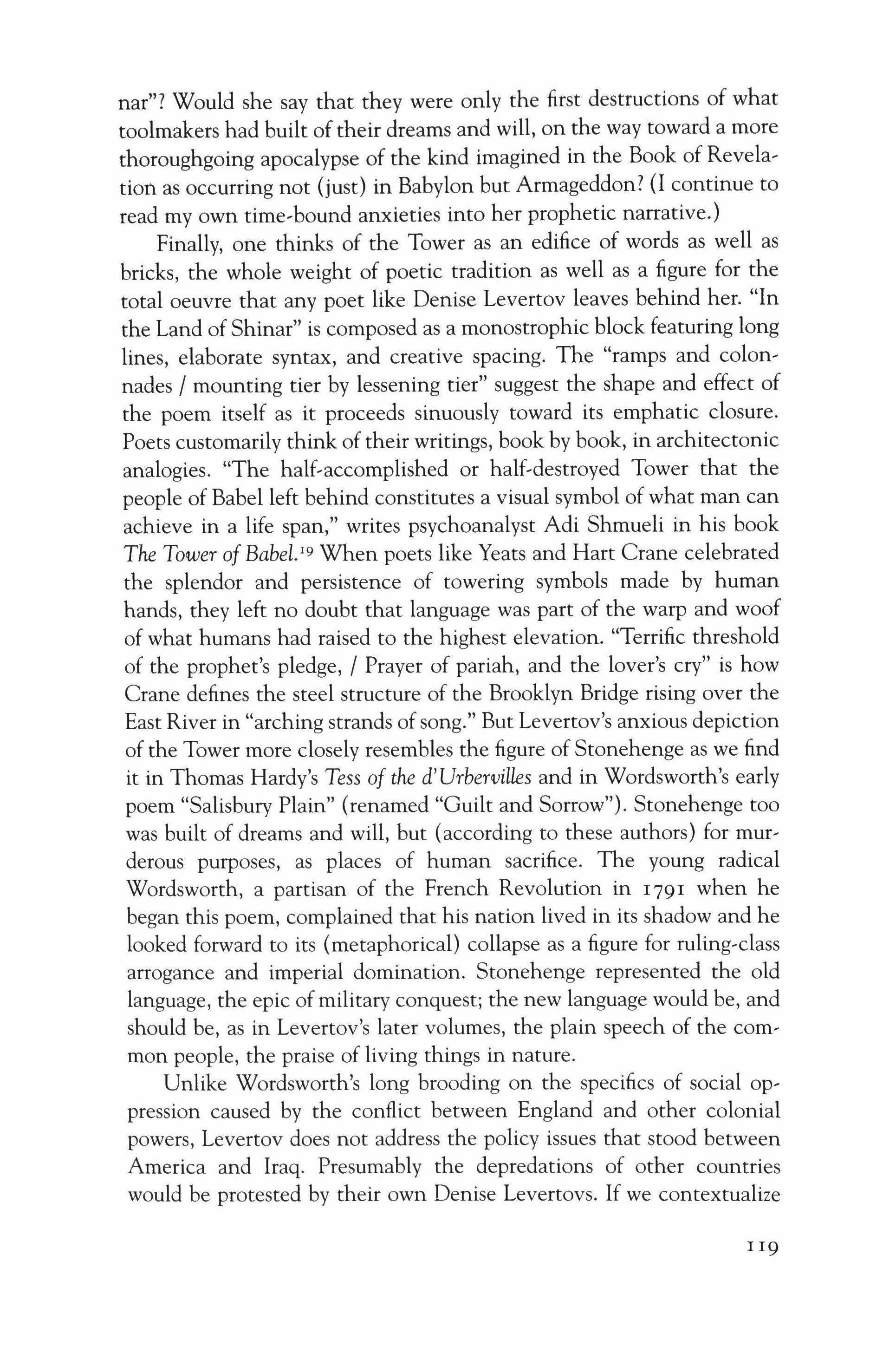
nar"? Would she say that they were only the first destructions of what toolmakers had built of their dreams and will, on the way toward a more thoroughgoing apocalypse of the kind imagined in the Book of Revelation as occurring not (just) in Babylon but Armageddon? (I continue to read my own time-bound anxieties into her prophetic narrative.)
Finally, one thinks of the Tower as an edifice of words as well as bricks, the whole weight of poetic tradition as well as a figure for the total oeuvre that any poet like Denise Levertov leaves behind her. "In the Land of Shinar" is composed as a monostrophic block featuring long lines, elaborate syntax, and creative spacing. The "ramps and colonnades / mounting tier by lessening tier" suggest the shape and effect of the poem itself as it proceeds sinuously toward its emphatic closure. Poets customarily think of their writings, book by book, in architectonic analogies. "The half-accomplished or half-destroyed Tower that the people of Babel left behind constitutes a visual symbol of what man can achieve in a life span," writes psychoanalyst Adi Shmueli in his book
The Tower of Babel. 19 When poets like Yeats and Hart Crane celebrated the splendor and persistence of towering symbols made by human hands, they left no doubt that language was part of the warp and woof of what humans had raised to the highest elevation. "Terrific threshold of the prophet's pledge, / Prayer of pariah, and the lover's cry" is how Crane defines the steel structure of the Brooklyn Bridge rising over the East River in "arching strands of song." But Levertov's anxious depiction of the Tower more closely resembles the figure of Stonehenge as we find it in Thomas Hardy's Tess of the d'Urbervilles and in Wordsworth's early poem "Salisbury Plain" (renamed "Guilt and Sorrow"). Stonehenge too was built of dreams and will, but (according to these authors) for murderous purposes, as places of human sacrifice. The young radical Wordsworth, a partisan of the French Revolution in 1791 when he began this poem, complained that his nation lived in its shadow and he looked forward to its (metaphorical) collapse as a figure for ruling-class arrogance and imperial domination. Stonehenge represented the old language, the epic of military conquest; the new language would be, and should be, as in Levertov's later volumes, the plain speech of the cornmon people, the praise of living things in nature.
Unlike Wordsworth's long brooding on the specifics of social oppression caused by the conflict between England and other colonial powers, Levertov does not address the policy issues that stood between America and Iraq. Presumably the depredations of other countries would be protested by their own Denise Levertovs. If we contextualize
119
the poem, we might say that she appropriated the Tower of Babel, making it as American a symbol as the Brooklyn Bridge. But, again, because of its location in what is now the nation of Iraq the Tower cannot help but also be the enduring symbol of the "other" culture, the Oriental an, tagonist. In the only poem that mentions the Tower of Babel in the 1992 anthology of poems about the Gulf War, After the Storm, F. D. Reeve writes, "Now the barbarian II calls on his god I to bomb the Tower of Babel again I from the tall blue skv.'?? Half against her politics, Lev, ertov resisted the impulse toward propaganda of this kind and kept the discourse of "In the Land of Shinar" universal. If we imagine it trans, lated into Arabic we can appreciate how Iraqis might read it as a critique of their late regime, and their cultural history.
This is not to say that Levertov yielded to her critics' complaints about her editorializing. This is a protest poem. But clearly Levertov was chastened by a global situation of uremitting political emergency, driven back to texts that assigned blame and personal responsibility to human nature not to nationality. Though the poem arguably foreshadows her poetry of inwardness and faith in the 1990S, it creates a time' less world not by escape into the asylum of personal sensibility or consciousness but through reference to an archaic text on the shared nature of evil. In one of her last poems, "A Hundred a Day," she looked back yearningly to the "Dear roth century" as a period that, whatever its horrors, offered hope of a future for nature and humanity alike." Modernity had ruined that hope, and "In the Land of Shinar" finds the perfect parable, in one of the oldest texts of the Western tradition, for the fatal dominance of the planet by human technics, including the mind-altering effects of ideologically charged language. One thing is certain, the poem has never been so relevant, so needful of study, as it is today.
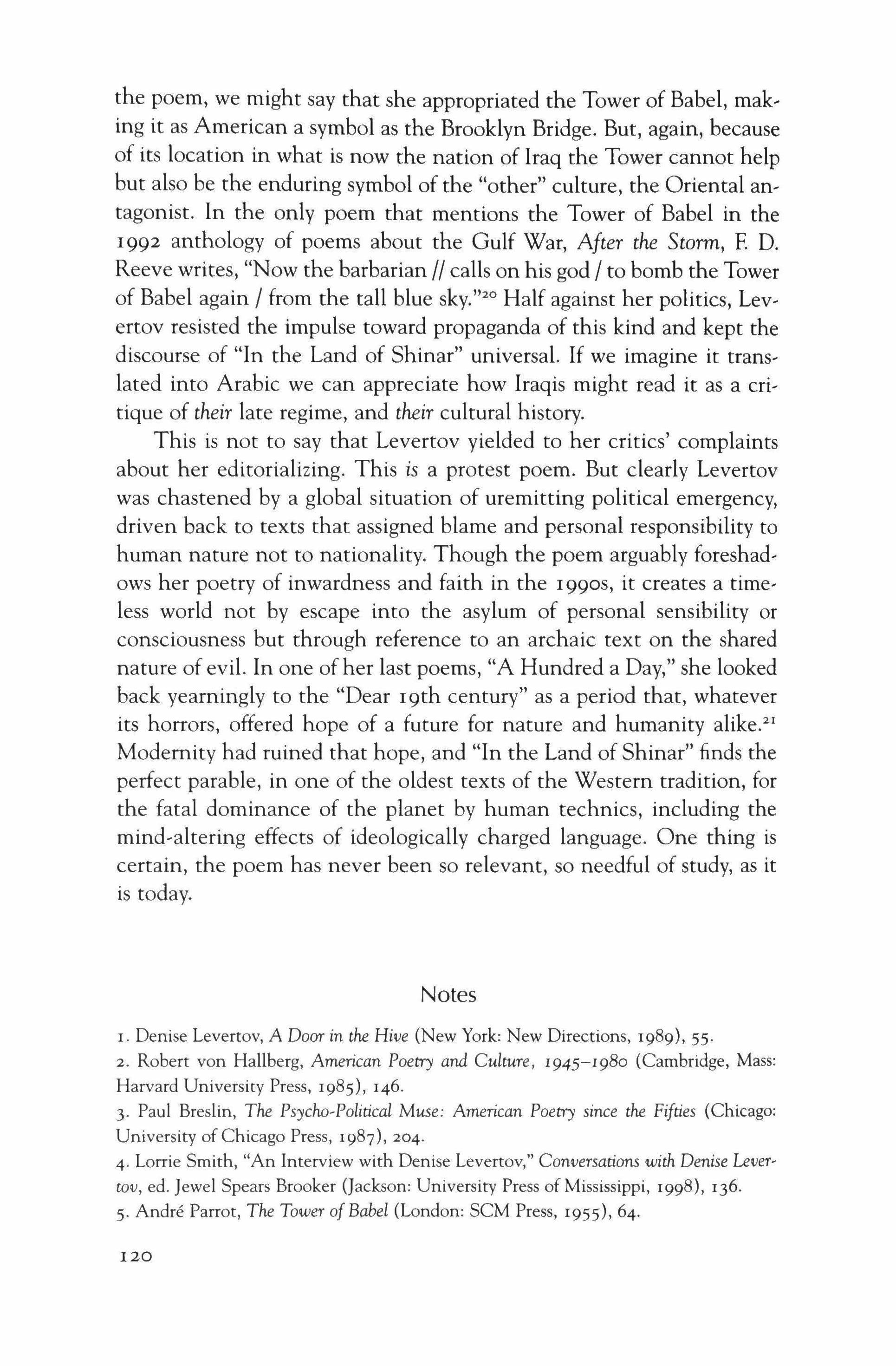
Notes
I. Denise Levertov, A Door in the Hive (New York: New Directions, 1989),55.
2. Robert von Hallberg, American Poetry and Culture, I945-I980 (Cambridge, Mass: Harvard University Press, 1985), 146.
3. Paul Breslin, The Psycho-Political Muse: American Poetry since the Fifties (Chicago: University of Chicago Press, 1987),204.
4. Lorrie Smith, "An Interview with Denise Levertov," Conversations with Denise Levertov, ed. Jewel Spears Brooker (Jackson: University Press of Mississippi, 1998), 136.
5. Andre Parrot, The Tower of Babel (London: SCM Press, 1955),64.
120
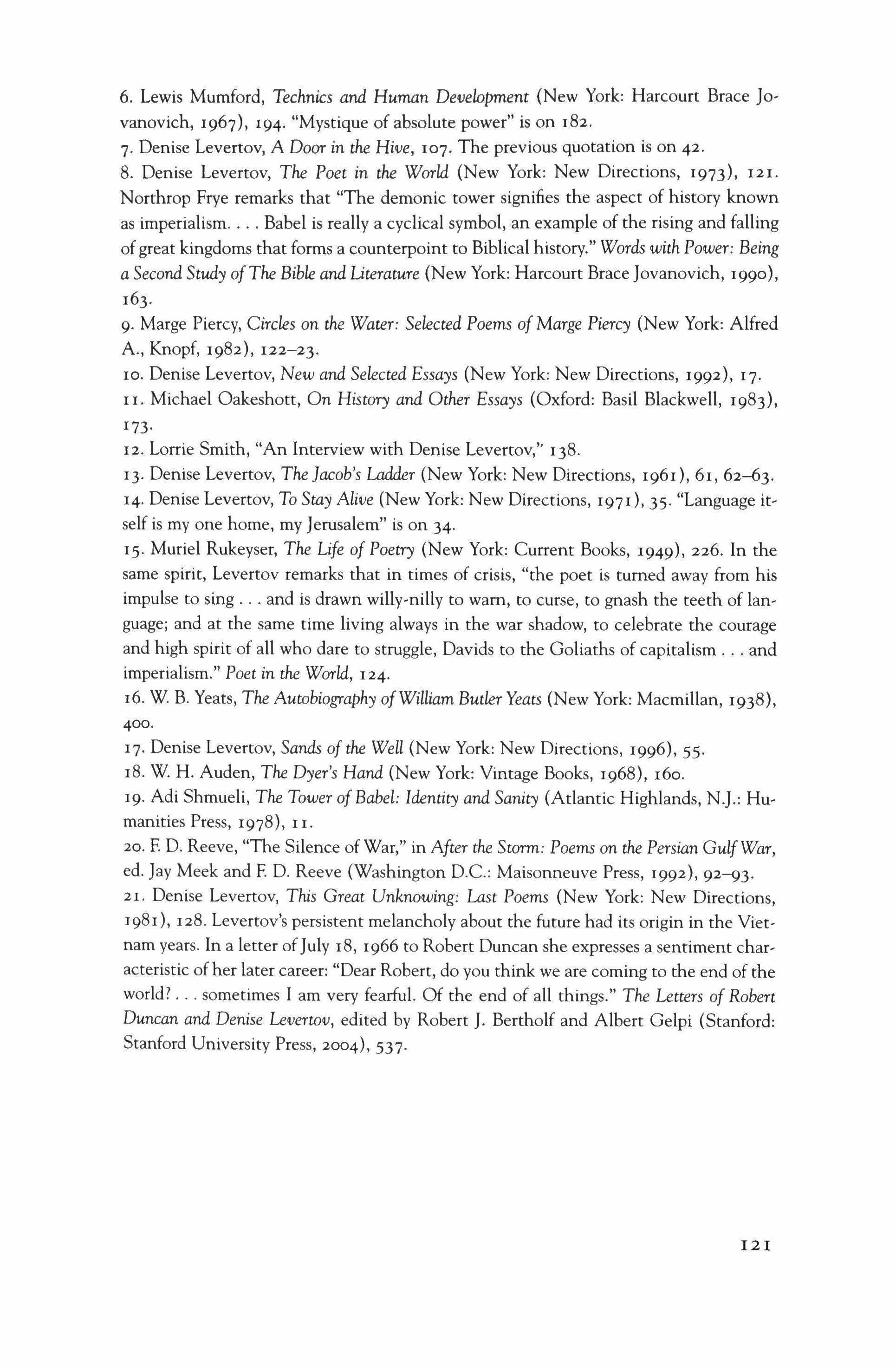
6. Lewis Mumford, Technics and Human Development (New York: Harcourt Brace Jovanovich, 1967), 194. "Mystique of absolute power" is on 182.
7. Denise Levertov, A Door in the Hive, 107. The previous quotation is on 42.
8. Denise Levertov, The Poet in the Warld (New York: New Directions, 1973), 12I. Northrop Frye remarks that "The demonic tower signifies the aspect of history known as imperialism Babel is really a cyclical symbol, an example of the rising and falling of great kingdoms that forms a counterpoint to Biblical history." Words with Power: Being a Second Study ofThe Bible and Literature (New York: Harcourt Brace Jovanovich, 1990), 163.
9. Marge Piercy, Circles on the Water: Selected Poems ofMarge Piercy (New York: Alfred A., Knopf, 1982), 122-23.
10. Denise Levertov, New and Selected Essays (New York: New Directions, 1992), 17.
II. Michael Oakeshott, On History and Other Essays (Oxford: Basil Blackwell, 1983), 173·
12. Lorrie Smith, "An Interview with Denise Levertov," 138.
13. Denise Levertov, The Jacob's Ladder (New York: New Directions, 1961),61,62-63.
14. Denise Levertov, To Stay Alive (New York: New Directions, 1971),35. "Language itself is my one home, my Jerusalem" is on 34.
IS· Muriel Rukeyser, The Life of Poetry (New York: Current Books, 1949), 226. In the same spirit, Levertov remarks that in times of crisis, "the poet is turned away from his impulse to sing and is drawn willv-nilly to warn, to curse, to gnash the teeth of language; and at the same time living always in the war shadow, to celebrate the courage and high spirit of all who dare to struggle, Davids to the Goliaths of capitalism and imperialism." Poet in the Warld, 124.
16. W. B. Yeats, The Auwbiography ofWilliam Butler Yeats (New York: Macmillan, 1938), 4°°·
17· Denise Levertov, Sands of the Well (New York: New Directions, 1996),55.
18. W. H. Auden, The Dyer's Hand (New York: Vintage Books, 1968), 160.
19· Adi Shmueli, The Tower of Babel: Identity and Sanity (Atlantic Highlands, N.J.: Humanities Press, 1978), II.
20. F. D. Reeve, "The Silence of War," in After the Storm: Poems on the Persian GulfWar, ed. Jay Meek and F. D. Reeve (Washington D.C.: Maisonneuve Press, 1992),92-93.
21. Denise Levertov, This Great Unknowing: Last Poems (New York: New Directions, 1981), 128. Levertov's persistent melancholy about the future had its origin in the Vietnam years. In a letter ofjuly 18, 1966 to Robert Duncan she expresses a sentiment characteristic of her later career: "Dear Robert, do you think we are coming to the end of the world? sometimes I am very fearful. Of the end of all things." The Letters of Robert Duncan and Denise Leverwv, edited by Robert J. Bertholf and Albert Gelpi (Stanford: Stanford University Press, 2004), 537.
121
Ewa Hryniewicz Yarbrough
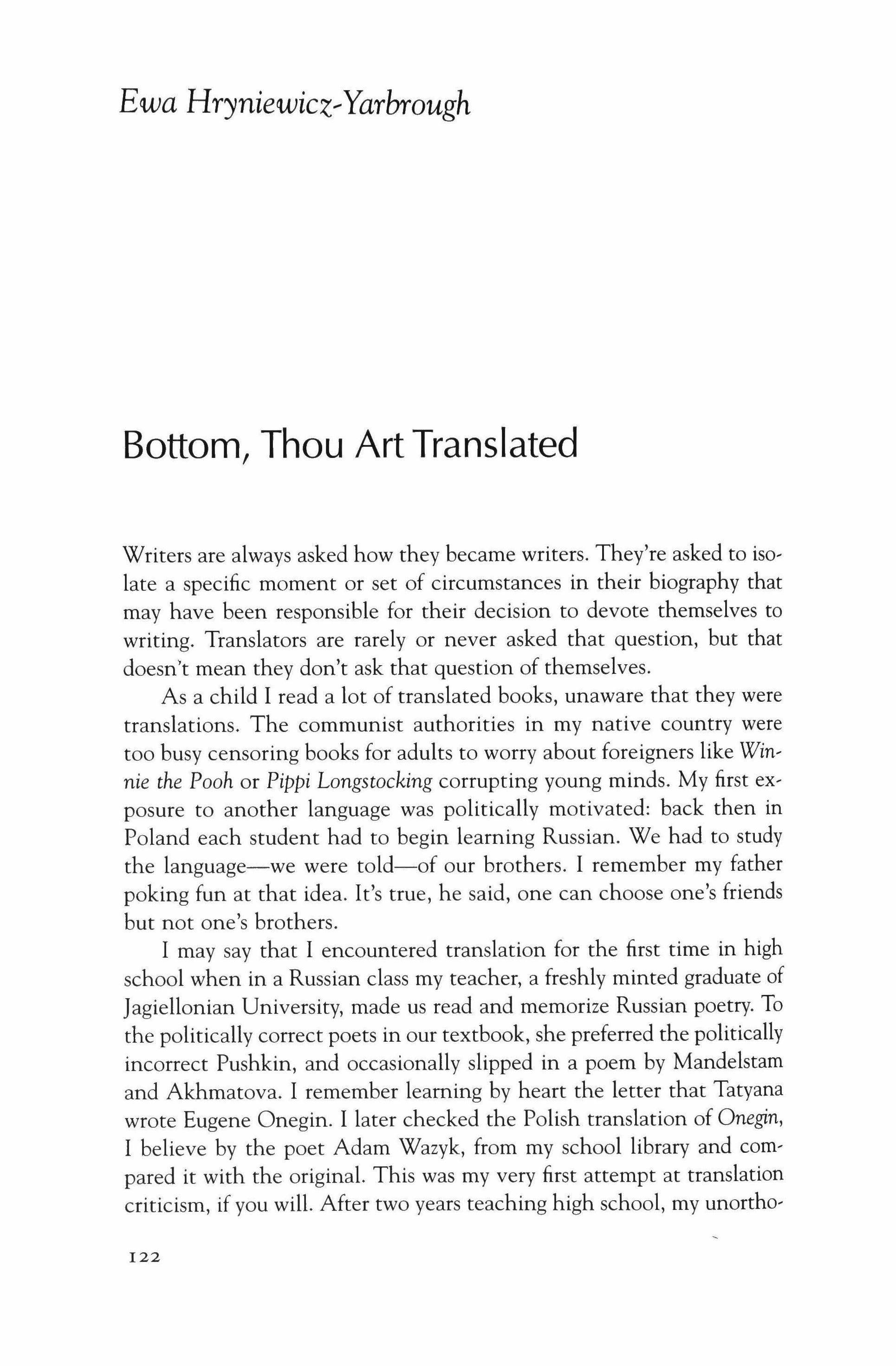
Bottom, Thou Art Translated
Writers are always asked how they became writers. They're asked to isolate a specific moment or set of circumstances in their biography that may have been responsible for their decision to devote themselves to writing. Translators are rarely or never asked that question, but that doesn't mean they don't ask that question of themselves.
As a child I read a lot of translated books, unaware that they were translations. The communist authorities in my native country were too busy censoring books for adults to worry about foreigners like Winnie the Pooh or Pippi Longstocking corrupting young minds. My first exposure to another language was politically motivated: back then in Poland each student had to begin learning Russian. We had to study the language-we were told-of our brothers. I remember my father poking fun at that idea. It's true, he said, one can choose one's friends but not one's brothers.
I may say that I encountered translation for the first time in high school when in a Russian class my teacher, a freshly minted graduate of Jagiellonian University, made us read and memorize Russian poetry. To the politically correct poets in our textbook, she preferred the politically incorrect Pushkin, and occasionally slipped in a poem by Mandelstam and Akhmatova. I remember learning by heart the letter that Tatyana wrote Eugene Onegin. I later checked the Polish translation of Onegin, I believe by the poet Adam Wazyk, from my school library and compared it with the original. This was my very first attempt at translation criticism, if you will. After two years teaching high school, my unortho-
122
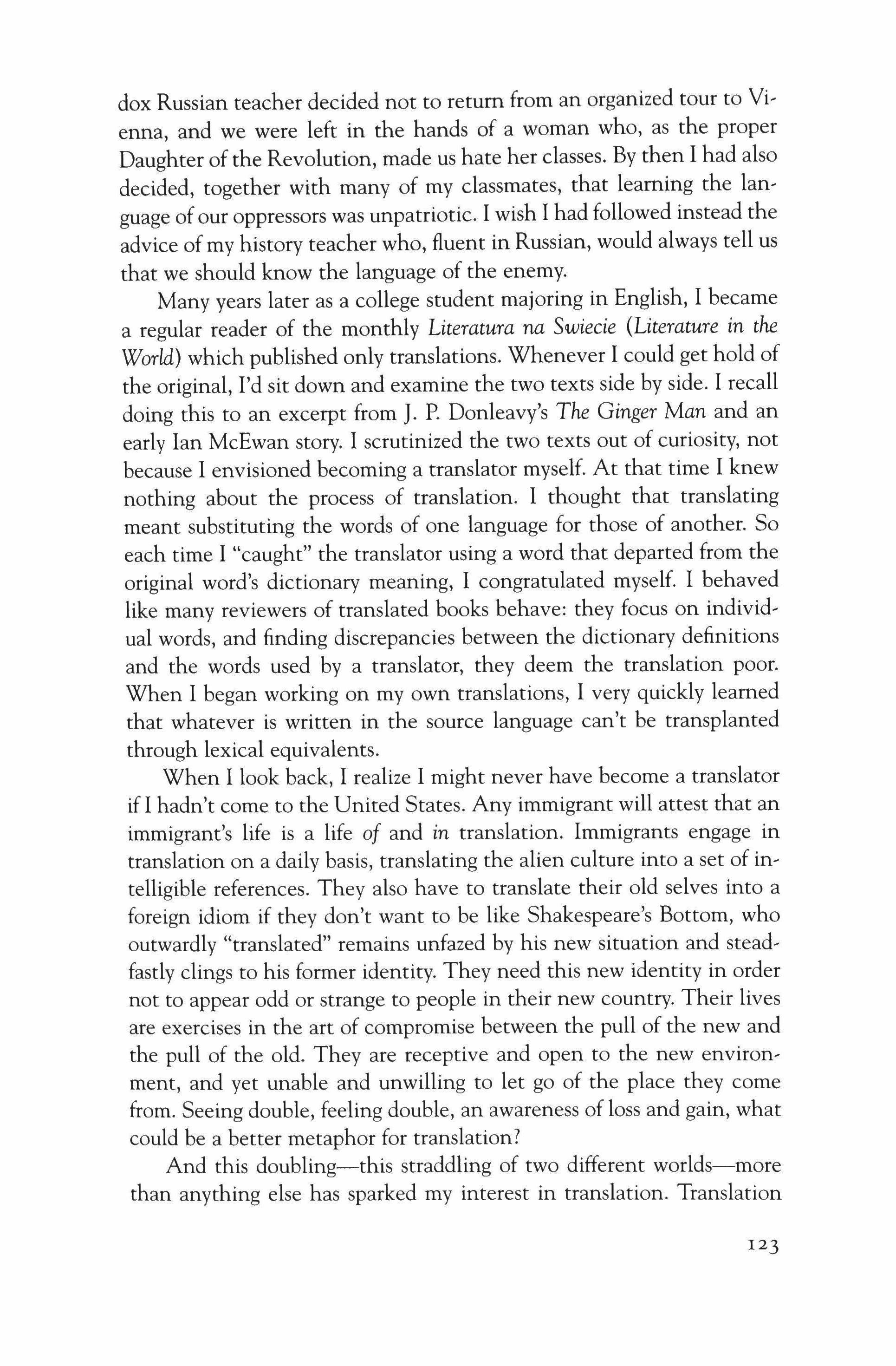
dox Russian teacher decided not to return from an organized tour to Vi, enna, and we were left in the hands of a woman who, as the proper Daughter of the Revolution, made us hate her classes. By then I had also decided, together with many of my classmates, that learning the language of our oppressors was unpatriotic. I wish I had followed instead the advice of my history teacher who, fluent in Russian, would always tell us that we should know the language of the enemy.
Many years later as a college student majoring in English, I became a regular reader of the monthly Literatura na Swiecie (Literature in the World) which published only translations. Whenever I could get hold of the original, I'd sit down and examine the two texts side by side. I recall doing this to an excerpt from J. P. Donleavy's The Ginger Man and an early Ian McEwan story. I scrutinized the two texts out of curiosity, not because I envisioned becoming a translator myself. At that time I knew nothing about the process of translation. I thought that translating meant substituting the words of one language for those of another. So each time I "caught" the translator using a word that departed from the original word's dictionary meaning, I congratulated myself. I behaved like many reviewers of translated books behave: they focus on individual words, and finding discrepancies between the dictionary definitions and the words used by a translator, they deem the translation poor. When I began working on my own translations, I very quickly learned that whatever is written in the source language can't be transplanted through lexical equivalents.
When I look back, I realize I might never have become a translator if I hadn't come to the United States. Any immigrant will attest that an immigrant's life is a life of and in translation. Immigrants engage in translation on a daily basis, translating the alien culture into a set of in, telligible references. They also have to translate their old selves into a foreign idiom if they don't want to be like Shakespeare's Bottom, who outwardly "translated" remains unfazed by his new situation and steadfastly clings to his former identity. They need this new identity in order not to appear odd or strange to people in their new country. Their lives are exercises in the art of compromise between the pull of the new and the pull of the old. They are receptive and open to the new environment, and yet unable and unwilling to let go of the place they come from. Seeing double, feeling double, an awareness of loss and gain, what could be a better metaphor for translation?
And this doubling-this straddling of two different worlds-more than anything else has sparked my interest in translation. Translation
123
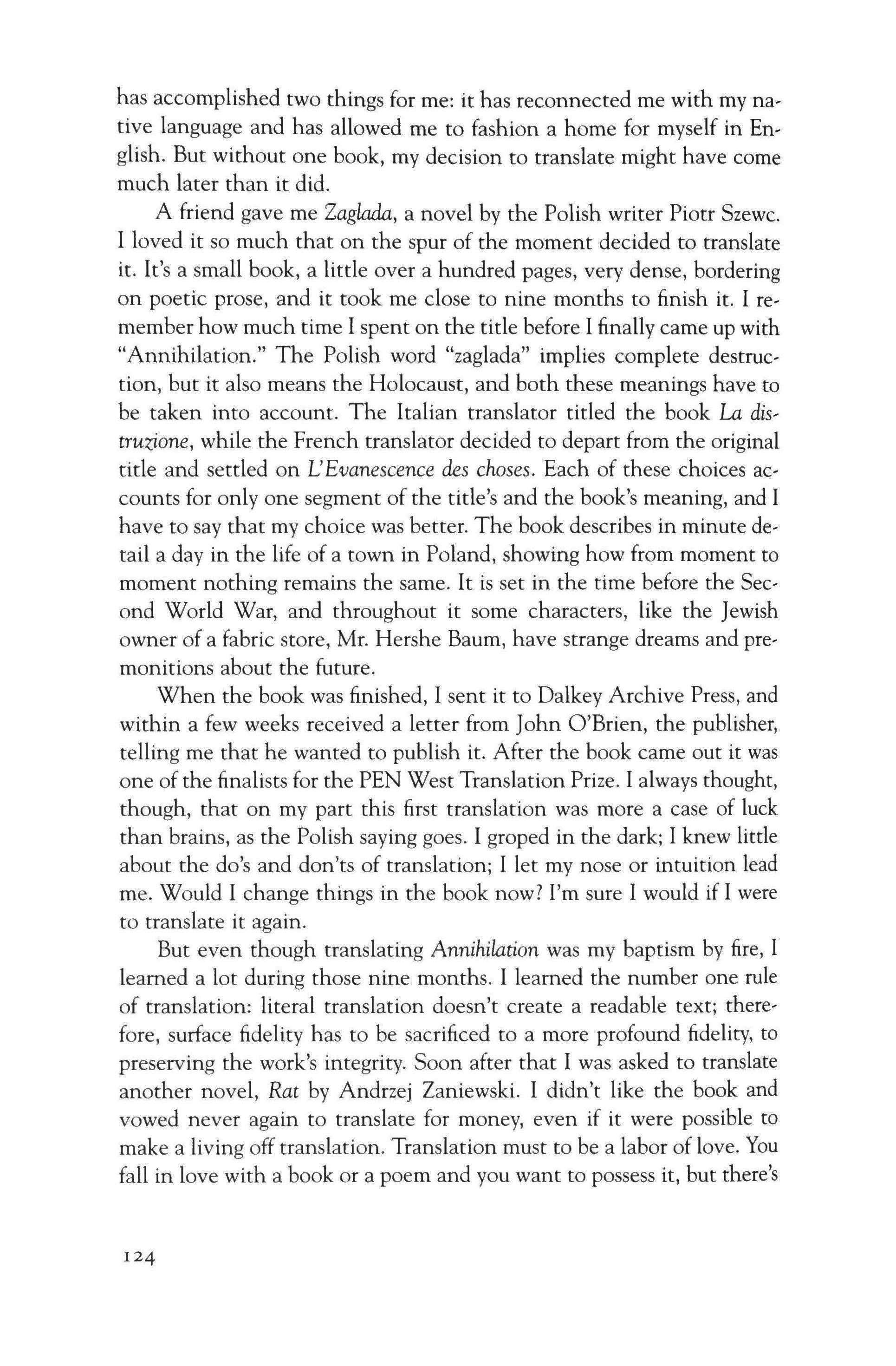
has accomplished two things for me: it has reconnected me with my native language and has allowed me to fashion a home for myself in En, glish, But without one book, my decision to translate might have come much later than it did.
A friend gave me Zaglada, a novel by the Polish writer Piotr Szewc. I loved it so much that on the spur of the moment decided to translate it. It's a small book, a little over a hundred pages, very dense, bordering on poetic prose, and it took me close to nine months to finish it. Ire, member how much time I spent on the title before I finally came up with "Annihilation." The Polish word "zaglada" implies complete destruction, but it also means the Holocaust, and both these meanings have to be taken into account. The Italian translator titled the book La dis, truzione, while the French translator decided to depart from the original title and settled on r;Evanescence des chases. Each of these choices accounts for only one segment of the title's and the book's meaning, and I have to say that my choice was better. The book describes in minute de, tail a day in the life of a town in Poland, showing how from moment to moment nothing remains the same. It is set in the time before the Sec, ond World War, and throughout it some characters, like the Jewish owner of a fabric store, Mr. Hershe Baum, have strange dreams and pre' monitions about the future.
When the book was finished, I sent it to Dalkey Archive Press, and within a few weeks received a letter from John O'Brien, the publisher, telling me that he wanted to publish it. After the book came out it was one of the finalists for the PEN West Translation Prize. I always thought, though, that on my part this first translation was more a case of luck than brains, as the Polish saying goes. I groped in the dark; I knew little about the do's and don'ts of translation; I let my nose or intuition lead me. Would I change things in the book now? I'm sure I would if I were to translate it again.
But even though translating Annihilation was my baptism by fire, I learned a lot during those nine months. I learned the number one rule of translation: literal translation doesn't create a readable text; there, fore, surface fidelity has to be sacrificed to a more profound fidelity, to preserving the work's integrity. Soon after that I was asked to translate another novel, Rat by Andrzej Zaniewski. I didn't like the book and vowed never again to translate for money, even if it were possible to make a living off translation. Translation must to be a labor of love. You fall in love with a book or a poem and you want to possess it, but there's
124
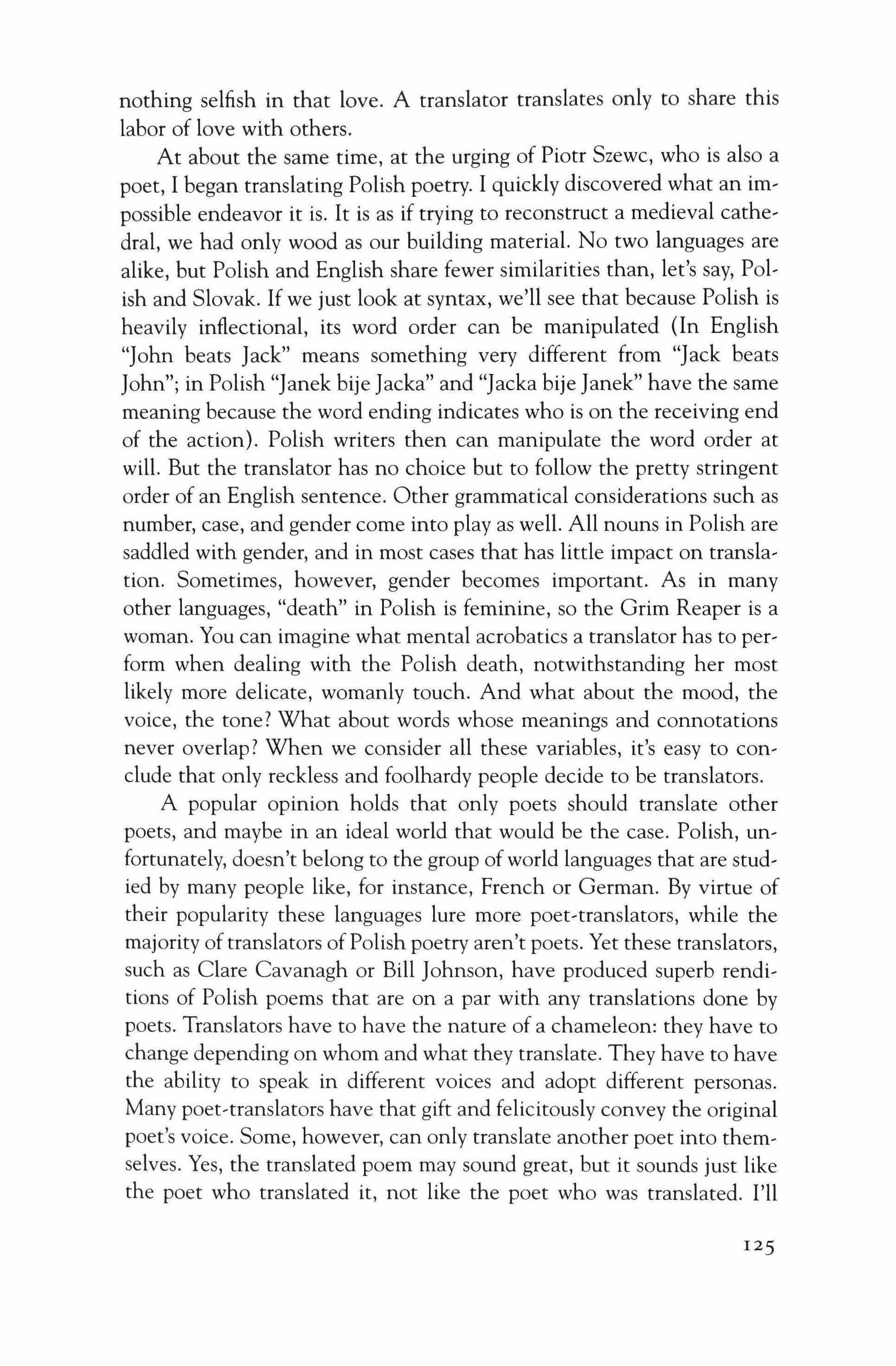
nothing selfish in that love. A translator translates only to share this labor of love with others.
At about the same time, at the urging of Piotr Szewc, who is also a poet, I began translating Polish poetry. I quickly discovered what an impossible endeavor it is. It is as if trying to reconstruct a medieval cathedral, we had only wood as our building material. No two languages are alike, but Polish and English share fewer similarities than, let's say, Pol, ish and Slovak. If we just look at syntax, we'll see that because Polish is heavily inflectional, its word order can be manipulated (In English "John beats Jack" means something very different from "Jack beats John"; in Polish "Janek bije Jacka" and "Jacka bije Janek" have the same meaning because the word ending indicates who is on the receiving end of the action). Polish writers then can manipulate the word order at will. But the translator has no choice but to follow the pretty stringent order of an English sentence. Other grammatical considerations such as number, case, and gender come into playas well. All nouns in Polish are saddled with gender, and in most cases that has little impact on translation. Sometimes, however, gender becomes important. As in many other languages, "death" in Polish is feminine, so the Grim Reaper is a woman. You can imagine what mental acrobatics a translator has to per' form when dealing with the Polish death, notwithstanding her most likely more delicate, womanly touch. And what about the mood, the voice, the tone? What about words whose meanings and connotations never overlap? When we consider all these variables, it's easy to con, elude that only reckless and foolhardy people decide to be translators.
A popular opinion holds that only poets should translate other poets, and maybe in an ideal world that would be the case. Polish, un, fortunately, doesn't belong to the group of world languages that are stud, ied by many people like, for instance, French or German. By virtue of their popularity these languages lure more poet,translators, while the majority of translators of Polish poetry aren't poets. Yet these translators, such as Clare Cavanagh or Bill Johnson, have produced superb renditions of Polish poems that are on a par with any translations done by poets. Translators have to have the nature of a chameleon: they have to change depending on whom and what they translate. They have to have the ability to speak in different voices and adopt different personas. Many poet-translators have that gift and felicitously convey the original poet's voice. Some, however, can only translate another poet into them, selves. Yes, the translated poem may sound great, but it sounds just like the poet who translated it, not like the poet who was translated. I'll
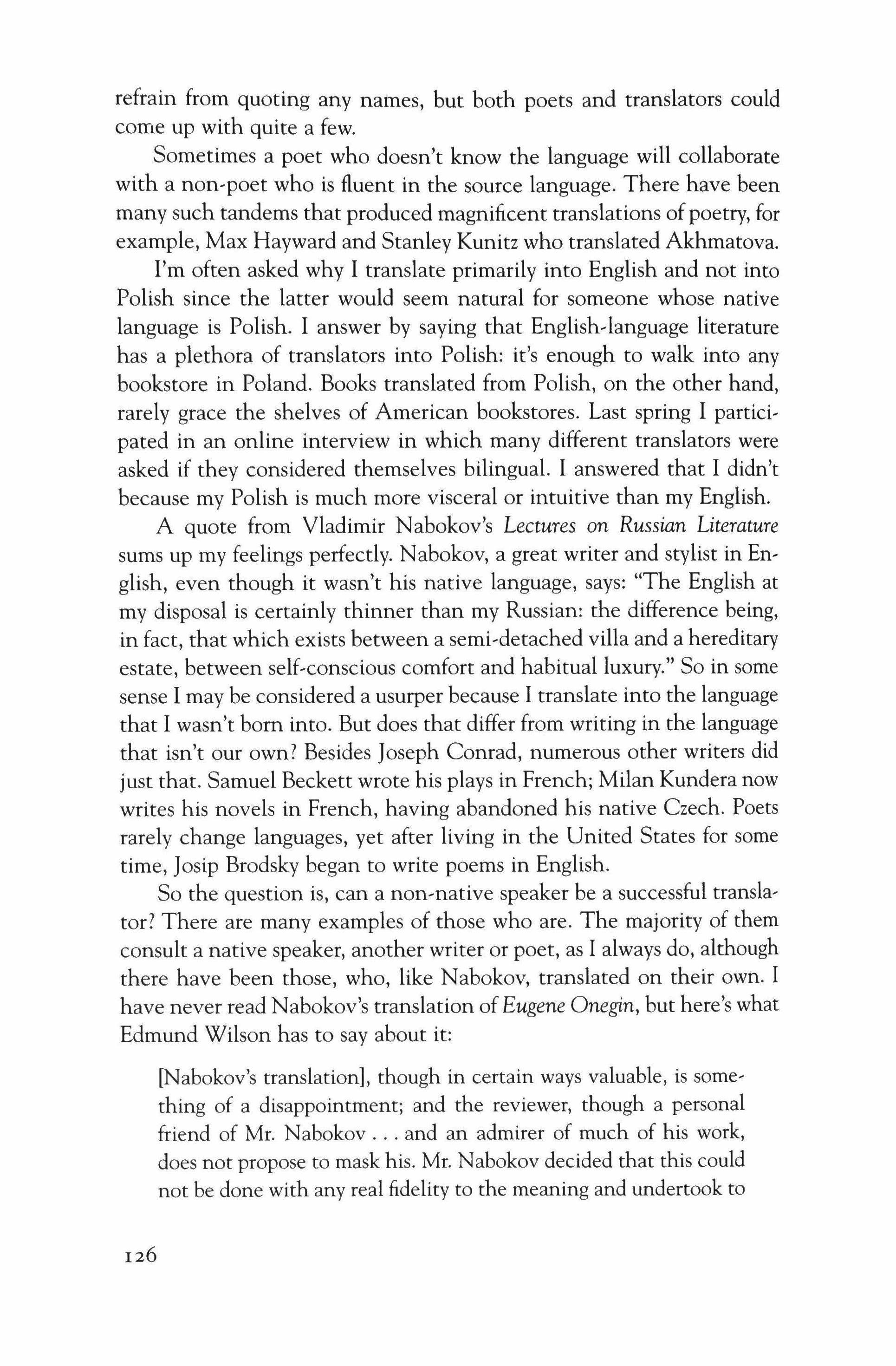
refrain from quoting any names, but both poets and translators could come up with quite a few.
Sometimes a poet who doesn't know the language will collaborate with a non-poet who is fluent in the source language. There have been many such tandems that produced magnificent translations ofpoetry, for example, Max Hayward and Stanley Kunitz who translated Akhmatova.
I'm often asked why I translate primarily into English and not into Polish since the latter would seem natural for someone whose native language is Polish. I answer by saying that English-language literature has a plethora of translators into Polish: it's enough to walk into any bookstore in Poland. Books translated from Polish, on the other hand, rarely grace the shelves of American bookstores. Last spring I participated in an online interview in which many different translators were asked if they considered themselves bilingual. I answered that I didn't because my Polish is much more visceral or intuitive than my English.
A quote from Vladimir Nabokov's Lectures on Russian Literature sums up my feelings perfectly. Nabokov, a great writer and stylist in English, even though it wasn't his native language, says: "The English at my disposal is certainly thinner than my Russian: the difference being, in fact, that which exists between a semi-detached villa and a hereditary estate, between self-conscious comfort and habitual luxury." So in some sense I may be considered a usurper because I translate into the language that I wasn't born into. But does that differ from writing in the language that isn't our own? Besides Joseph Conrad, numerous other writers did just that. Samuel Beckett wrote his plays in French; Milan Kundera now writes his novels in French, having abandoned his native Czech. Poets rarely change languages, yet after living in the United States for some time, Josip Brodsky began to write poems in English.
So the question is, can a non-native speaker be a successful translator? There are many examples of those who are. The majority of them consult a native speaker, another writer or poet, as I always do, although there have been those, who, like Nabokov, translated on their own. I have never read Nabokov's translation of Eugene Onegin, but here's what Edmund Wilson has to say about it:
[Nabokov's translation]' though in certain ways valuable, is something of a disappointment; and the reviewer, though a personal friend of Mr. Nabokov and an admirer of much of his work, does not propose to mask his. Mr. Nabokov decided that this could not be done with any real fidelity to the meaning and undertook to
126
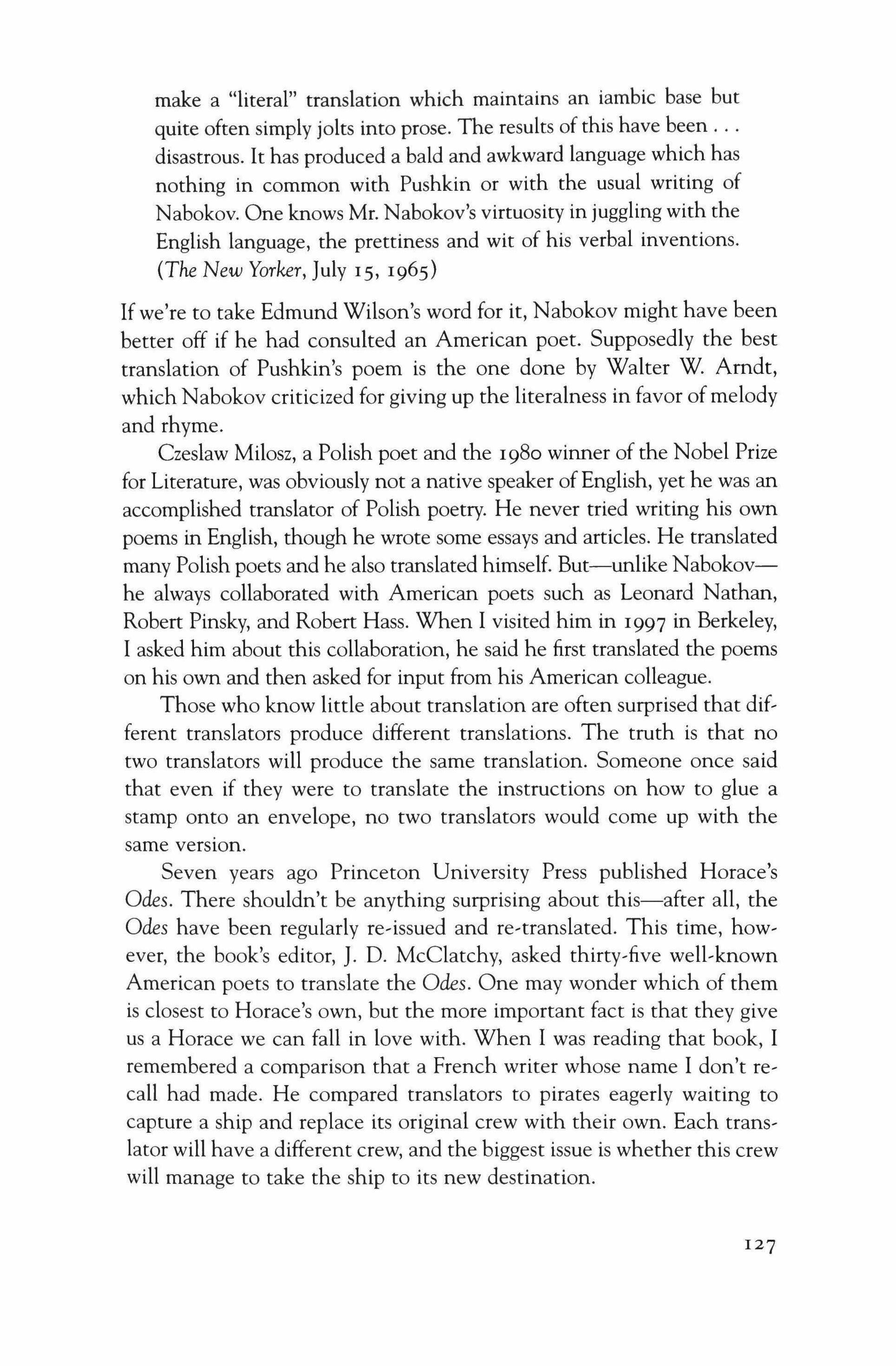
make a "literal" translation which maintains an iambic base but quite often simply jolts into prose. The results of this have been disastrous. It has produced a bald and awkward language which has nothing in common with Pushkin or with the usual writing of Nabokov. One knows Mr. Nabokov's virtuosity in juggling with the English language, the prettiness and wit of his verbal inventions.
(The New Yorker, July 15, 1965)
If we're to take Edmund Wilson's word for it, Nabokov might have been better off if he had consulted an American poet. Supposedly the best translation of Pushkin's poem is the one done by Walter W. Arndt, which Nabokov criticized for giving up the literalness in favor ofmelody and rhyme.
Czeslaw Milosz, a Polish poet and the 1980 winner of the Nobel Prize for Literature, was obviously not a native speaker ofEnglish, yet he was an accomplished translator of Polish poetry. He never tried writing his own poems in English, though he wrote some essays and articles. He translated many Polish poets and he also translated himself. But-unlike Nabokovhe always collaborated with American poets such as Leonard Nathan, Robert Pinsky, and Robert Hass. When I visited him in 1997 in Berkeley, I asked him about this collaboration, he said he first translated the poems on his own and then asked for input from his American colleague.
Those who know little about translation are often surprised that different translators produce different translations. The truth is that no two translators will produce the same translation. Someone once said that even if they were to translate the instructions on how to glue a stamp onto an envelope, no two translators would come up with the same version.
Seven years ago Princeton University Press published Horace's Odes. There shouldn't be anything surprising about this-after all, the Odes have been regularly re-issued and re-translated. This time, however, the book's editor, J. D. McClatchy, asked thirty-five well-known American poets to translate the Odes. One may wonder which of them is closest to Horace's own, but the more important fact is that they give us a Horace we can fall in love with. When I was reading that book, I remembered a comparison that a French writer whose name I don't recall had made. He compared translators to pirates eagerly waiting to capture a ship and replace its original crew with their own. Each translator will have a different crew, and the biggest issue is whether this crew will manage to take the ship to its new destination.
127
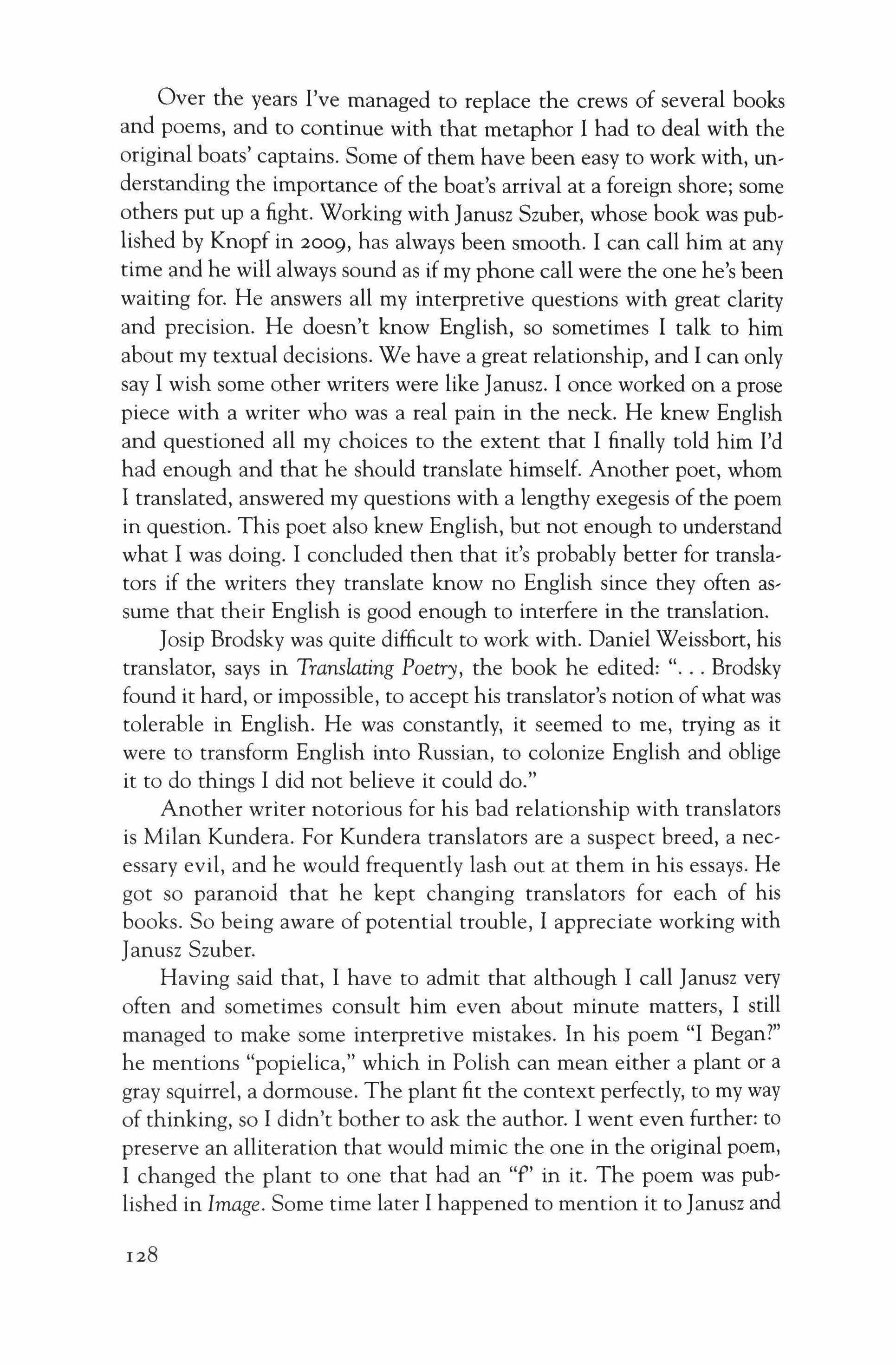
Over the years I've managed to replace the crews of several books and poems, and to continue with that metaphor I had to deal with the original boats' captains. Some of them have been easy to work with, understanding the importance of the boat's arrival at a foreign shore; some others put up a fight. Working with Janusz Szuber, whose book was published by Knopf in 2009, has always been smooth. I can call him at any time and he will always sound as if my phone call were the one he's been waiting for. He answers all my interpretive questions with great clarity and precision. He doesn't know English, so sometimes I talk to him about my textual decisions. We have a great relationship, and I can only say I wish some other writers were like Janusz. I once worked on a prose piece with a writer who was a real pain in the neck. He knew English and questioned all my choices to the extent that I finally told him I'd had enough and that he should translate himself. Another poet, whom I translated, answered my questions with a lengthy exegesis of the poem in question. This poet also knew English, but not enough to understand what I was doing. I concluded then that it's probably better for translators if the writers they translate know no English since they often assume that their English is good enough to interfere in the translation. [osip Brodsky was quite difficult to work with. Daniel Weissbort, his translator, says in Translating Poetry, the book he edited: Brodsky found it hard, or impossible, to accept his translator's notion ofwhat was tolerable in English. He was constantly, it seemed to me, trying as it were to transform English into Russian, to colonize English and oblige it to do things I did not believe it could do."
Another writer notorious for his bad relationship with translators is Milan Kundera. For Kundera translators are a suspect breed, a necessary evil, and he would frequently lash out at them in his essays. He got so paranoid that he kept changing translators for each of his books. So being aware of potential trouble, I appreciate working with Janusz Szuber.
Having said that, I have to admit that although I call Janusz very often and sometimes consult him even about minute matters, I still managed to make some interpretive mistakes. In his poem "I Began?" he mentions "popielica," which in Polish can mean either a plant or a gray squirrel, a dormouse. The plant fit the context perfectly, to my way of thinking, so I didn't bother to ask the author. I went even further: to preserve an alliteration that would mimic the one in the original poem, I changed the plant to one that had an "P' in it. The poem was published in Image. Some time later I happened to mention it to Janusz and
128
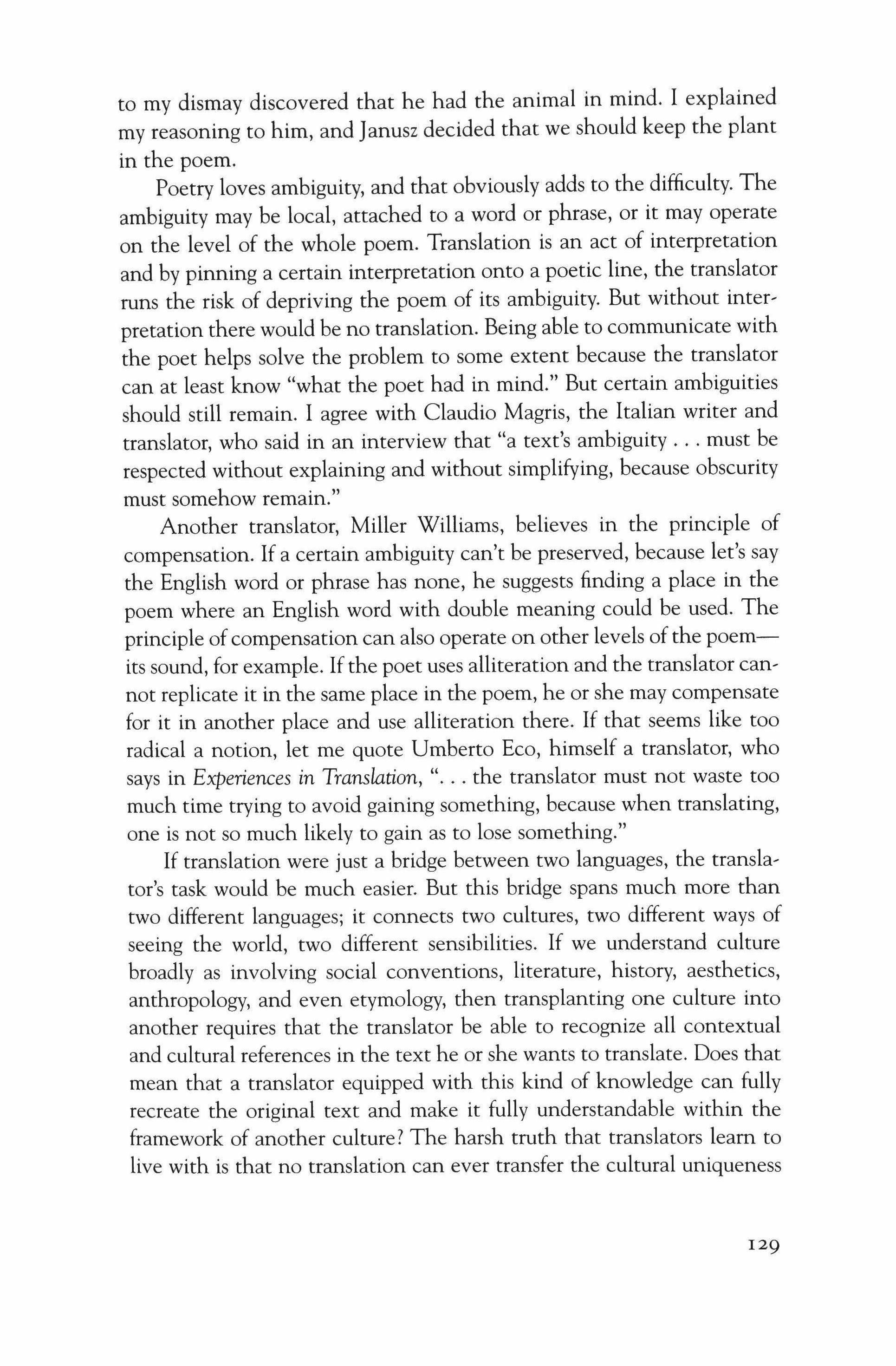
to my dismay discovered that he had the animal in mind. I explained my reasoning to him, and Janusz decided that we should keep the plant in the poem.
Poetry loves ambiguity, and that obviously adds to the difficulty. The ambiguity may be local, attached to a word or phrase, or it may operate on the level of the whole poem. Translation is an act of interpretation and by pinning a certain interpretation onto a poetic line, the translator runs the risk of depriving the poem of its ambiguity. But without interpretation there would be no translation. Being able to communicate with the poet helps solve the problem to some extent because the translator can at least know "what the poet had in mind." But certain ambiguities should still remain. I agree with Claudio Magris, the Italian writer and translator, who said in an interview that "a text's ambiguity must be respected without explaining and without simplifying, because obscurity must somehow remain."
Another translator, Miller Williams, believes in the principle of compensation. If a certain ambiguity can't be preserved, because let's say the English word or phrase has none, he suggests finding a place in the poem where an English word with double meaning could be used. The principle of compensation can also operate on other levels ofthe poemits sound, for example. If the poet uses alliteration and the translator cannot replicate it in the same place in the poem, he or she may compensate for it in another place and use alliteration there. If that seems like too radical a notion, let me quote Umberto Eco, himself a translator, who says in Experiences in Translation, the translator must not waste too much time trying to avoid gaining something, because when translating, one is not so much likely to gain as to lose something."
If translation were just a bridge between two languages, the translator's task would be much easier. But this bridge spans much more than two different languages; it connects two cultures, two different ways of seeing the world, two different sensibilities. If we understand culture broadly as involving social conventions, literature, history, aesthetics, anthropology, and even etymology, then transplanting one culture into another requires that the translator be able to recognize all contextual and cultural references in the text he or she wants to translate. Does that mean that a translator equipped with this kind of knowledge can fully recreate the original text and make it fully understandable within the framework of another culture? The harsh truth that translators learn to live with is that no translation can ever transfer the cultural uniqueness
129
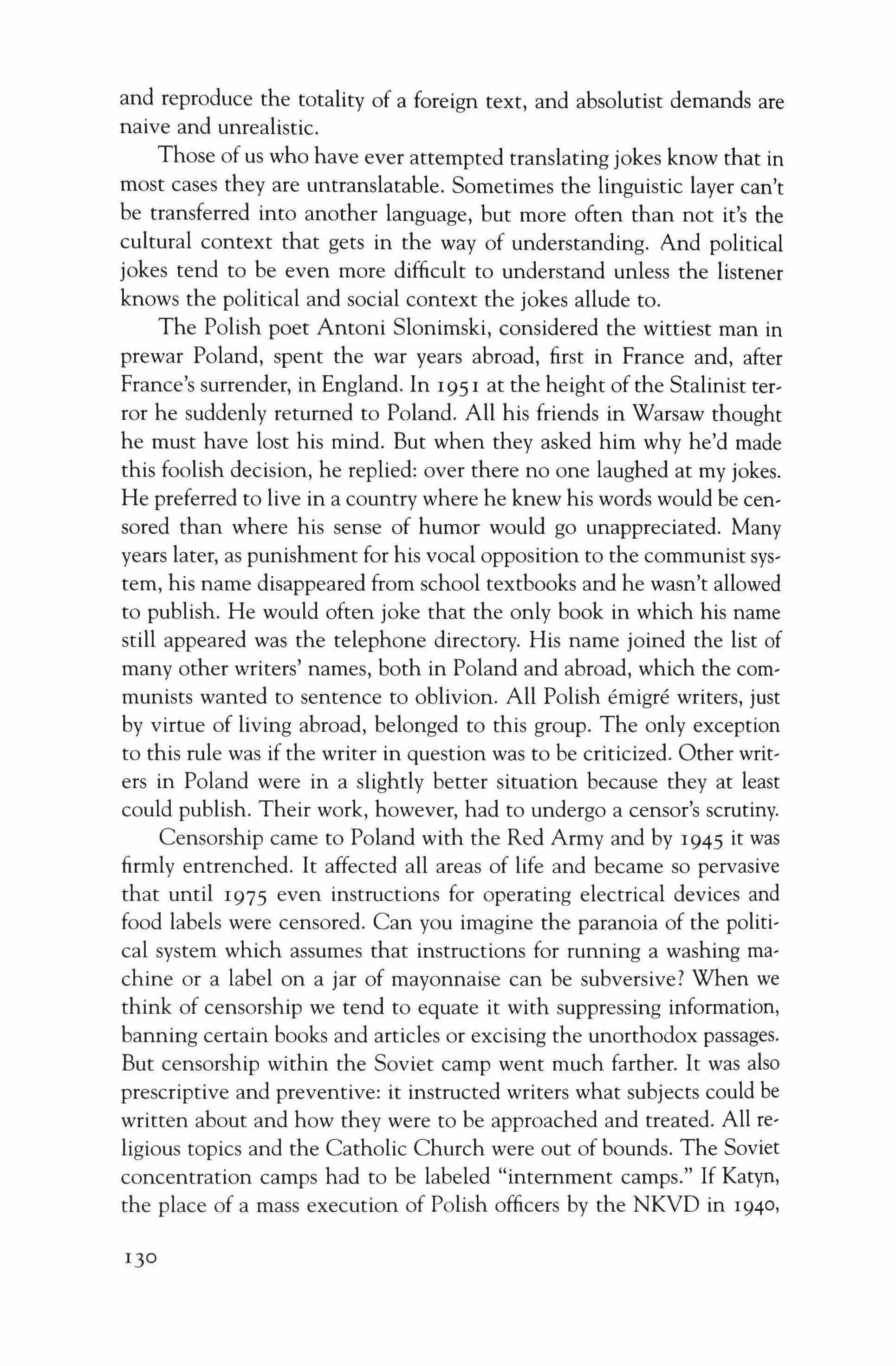
and reproduce the totality of a foreign text, and absolutist demands are naive and unrealistic.
Those of us who have ever attempted translating jokes know that in most cases they are untranslatable. Sometimes the linguistic layer can't be transferred into another language, but more often than not it's the cultural context that gets in the way of understanding. And political jokes tend to be even more difficult to understand unless the listener knows the political and social context the jokes allude to.
The Polish poet Antoni Slonimski, considered the wittiest man in prewar Poland, spent the war years abroad, first in France and, after France's surrender, in England. In 1951 at the height of the Stalinist terror he suddenly returned to Poland. All his friends in Warsaw thought he must have lost his mind. But when they asked him why he'd made this foolish decision, he replied: over there no one laughed at my jokes. He preferred to live in a country where he knew his words would be censored than where his sense of humor would go unappreciated. Many years later, as punishment for his vocal opposition to the communist system, his name disappeared from school textbooks and he wasn't allowed to publish. He would often joke that the only book in which his name still appeared was the telephone directory. His name joined the list of many other writers' names, both in Poland and abroad, which the communists wanted to sentence to oblivion. All Polish emigre writers, just by virtue of living abroad, belonged to this group. The only exception to this rule was if the writer in question was to be criticized. Other writers in Poland were in a slightly better situation because they at least could publish. Their work, however, had to undergo a censor's scrutiny.
Censorship came to Poland with the Red Army and by 1945 it was firmly entrenched. It affected all areas of life and became so pervasive that until 1975 even instructions for operating electrical devices and food labels were censored. Can you imagine the paranoia of the political system which assumes that instructions for running a washing machine or a label on a jar of mayonnaise can be subversive? When we think of censorship we tend to equate it with suppressing information, banning certain books and articles or excising the unorthodox passages. But censorship within the Soviet camp went much farther. It was also prescriptive and preventive: it instructed writers what subjects could be written about and how they were to be approached and treated. All religious topics and the Catholic Church were out of bounds. The Soviet concentration camps had to be labeled "internment camps." If Karyn, the place of a mass execution of Polish officers by the NKYD in 1940,
130
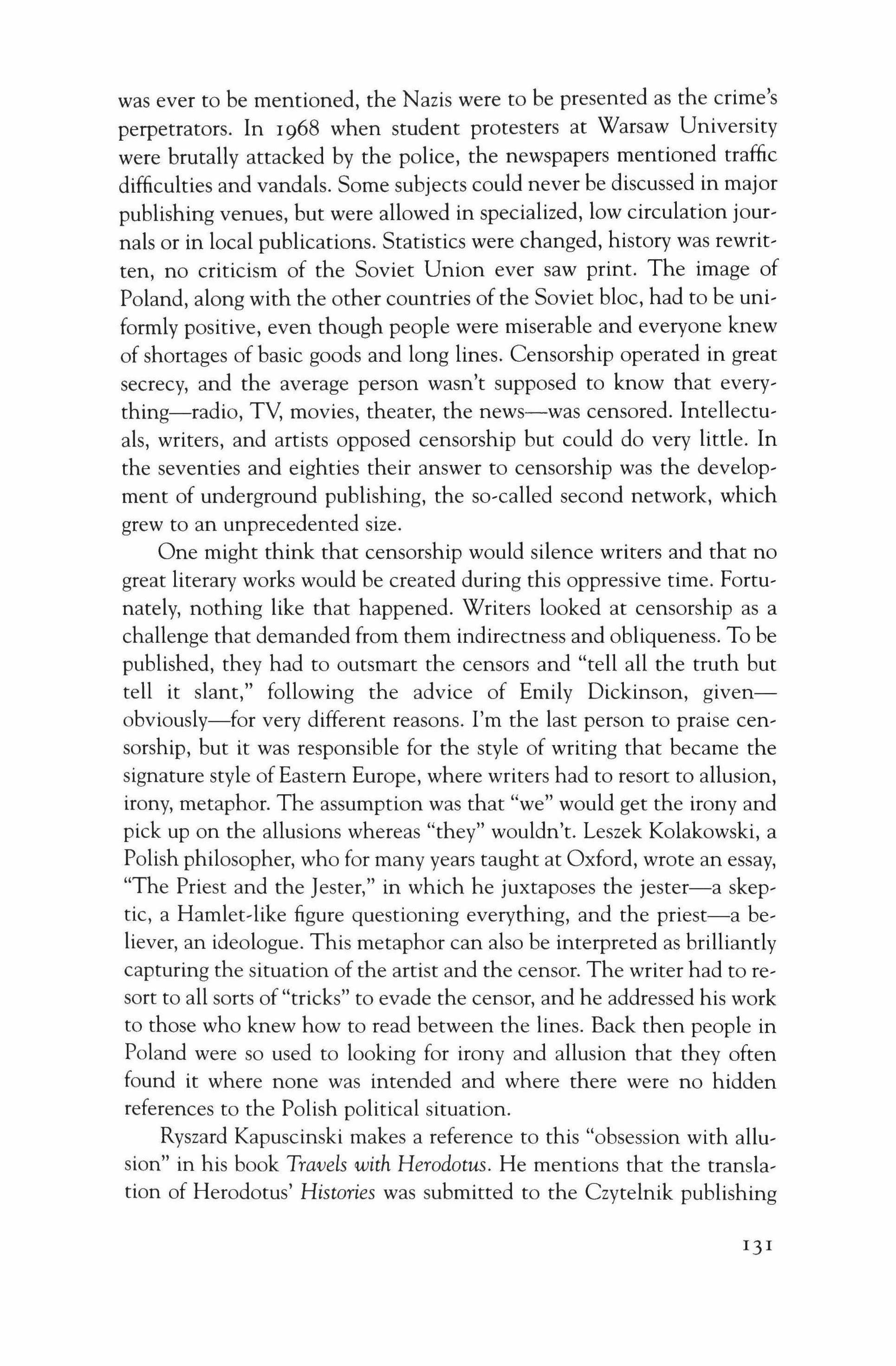
was ever to be mentioned, the Nazis were to be presented as the crime's perpetrators. In 1968 when student protesters at Warsaw University were brutally attacked by the police, the newspapers mentioned traffic difficulties and vandals. Some subjects could never be discussed in major publishing venues, but were allowed in specialized, low circulation journals or in local publications. Statistics were changed, history was rewritten, no criticism of the Soviet Union ever saw print. The image of Poland, along with the other countries of the Soviet bloc, had to be uniformly positive, even though people were miserable and everyone knew of shortages of basic goods and long lines. Censorship operated in great secrecy, and the average person wasn't supposed to know that everything-radio, TV, movies, theater, the news-was censored. Intellectuals, writers, and artists opposed censorship but could do very little. In the seventies and eighties their answer to censorship was the development of underground publishing, the so-called second network, which grew to an unprecedented size.
One might think that censorship would silence writers and that no great literary works would be created during this oppressive time. Fortunately, nothing like that happened. Writers looked at censorship as a challenge that demanded from them indirectness and obliqueness. To be published, they had to outsmart the censors and "tell all the truth but tell it slant," following the advice of Emily Dickinson, givenobviously-for very different reasons. I'm the last person to praise censorship, but it was responsible for the style of writing that became the signature style of Eastern Europe, where writers had to resort to allusion, irony, metaphor. The assumption was that "we" would get the irony and pick up on the allusions whereas "they" wouldn't. Leszek Kolakowski, a Polish philosopher, who for many years taught at Oxford, wrote an essay, "The Priest and the Jester," in which he juxtaposes the jester-a skeptic, a Hamlet-like figure questioning everything, and the priest-a believer, an ideologue. This metaphor can also be interpreted as brilliantly capturing the situation of the artist and the censor. The writer had to resort to all sorts of "tricks" to evade the censor, and he addressed his work to those who knew how to read between the lines. Back then people in Poland were so used to looking for irony and allusion that they often found it where none was intended and where there were no hidden references to the Polish political situation.
Ryszard Kapuscinski makes a reference to this "obsession with allusion" in his book Travels with Herodotus. He mentions that the translation of Herodotus' Histories was submitted to the Czytelnik publishing
131
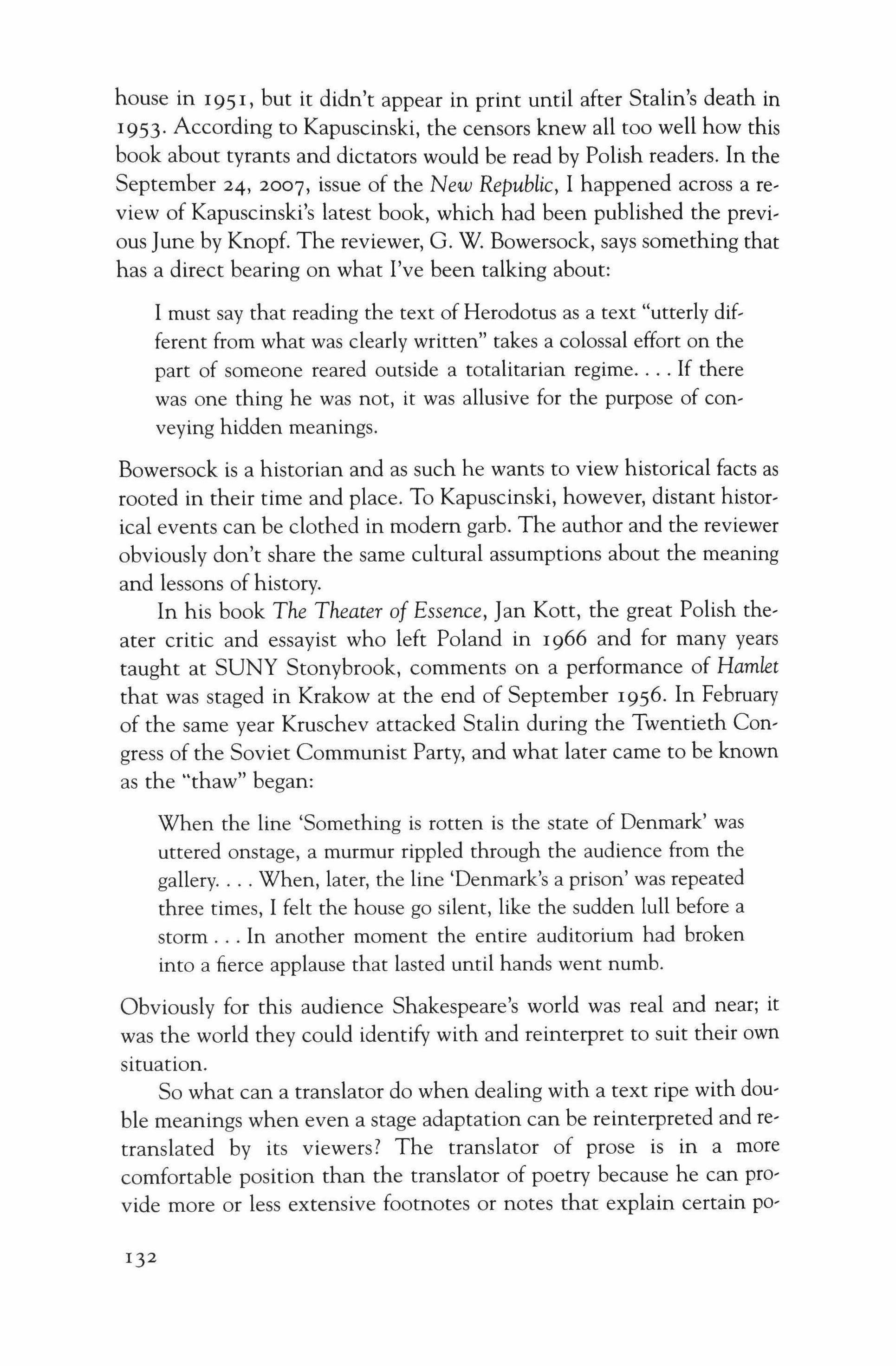
house in 1951, but it didn't appear in print until after Stalin's death in 1953· According to Kapuscinski, the censors knew all too well how this book about tyrants and dictators would be read by Polish readers. In the September 24, 2007, issue of the New Republic, I happened across a review of Kapuscinski's latest book, which had been published the previous June by Knopf. The reviewer, G. W. Bowersock, says something that has a direct bearing on what I've been talking about:
I must say that reading the text of Herodotus as a text "utterly different from what was clearly written" takes a colossal effort on the part of someone reared outside a totalitarian regime If there was one thing he was not, it was allusive for the purpose of conveying hidden meanings.
Bowersock is a historian and as such he wants to view historical facts as rooted in their time and place. To Kapuscinski, however, distant historical events can be clothed in modem garb. The author and the reviewer obviously don't share the same cultural assumptions about the meaning and lessons of history.
In his book The Theater of Essence, Jan Kott, the great Polish theater critic and essayist who left Poland in 1966 and for many years taught at SUNY Stonybrook, comments on a performance of Hamlet that was staged in Krakow at the end of September 1956. In February of the same year Kruschev attacked Stalin during the Twentieth Congress of the Soviet Communist Party, and what later came to be known as the "thaw" began:
When the line 'Something is rotten is the state of Denmark' was uttered onstage, a murmur rippled through the audience from the gallery When, later, the line 'Denmark's a prison' was repeated three times, I felt the house go silent, like the sudden lull before a storm In another moment the entire auditorium had broken into a fierce applause that lasted until hands went numb.
Obviously for this audience Shakespeare's world was real and near; it was the world they could identify with and reinterpret to suit their own situation.
So what can a translator do when dealing with a text ripe with double meanings when even a stage adaptation can be reinterpreted and retranslated by its viewers? The translator of prose is in a more comfortable position than the translator of poetry because he can provide more or less extensive footnotes or notes that explain certain po-
132
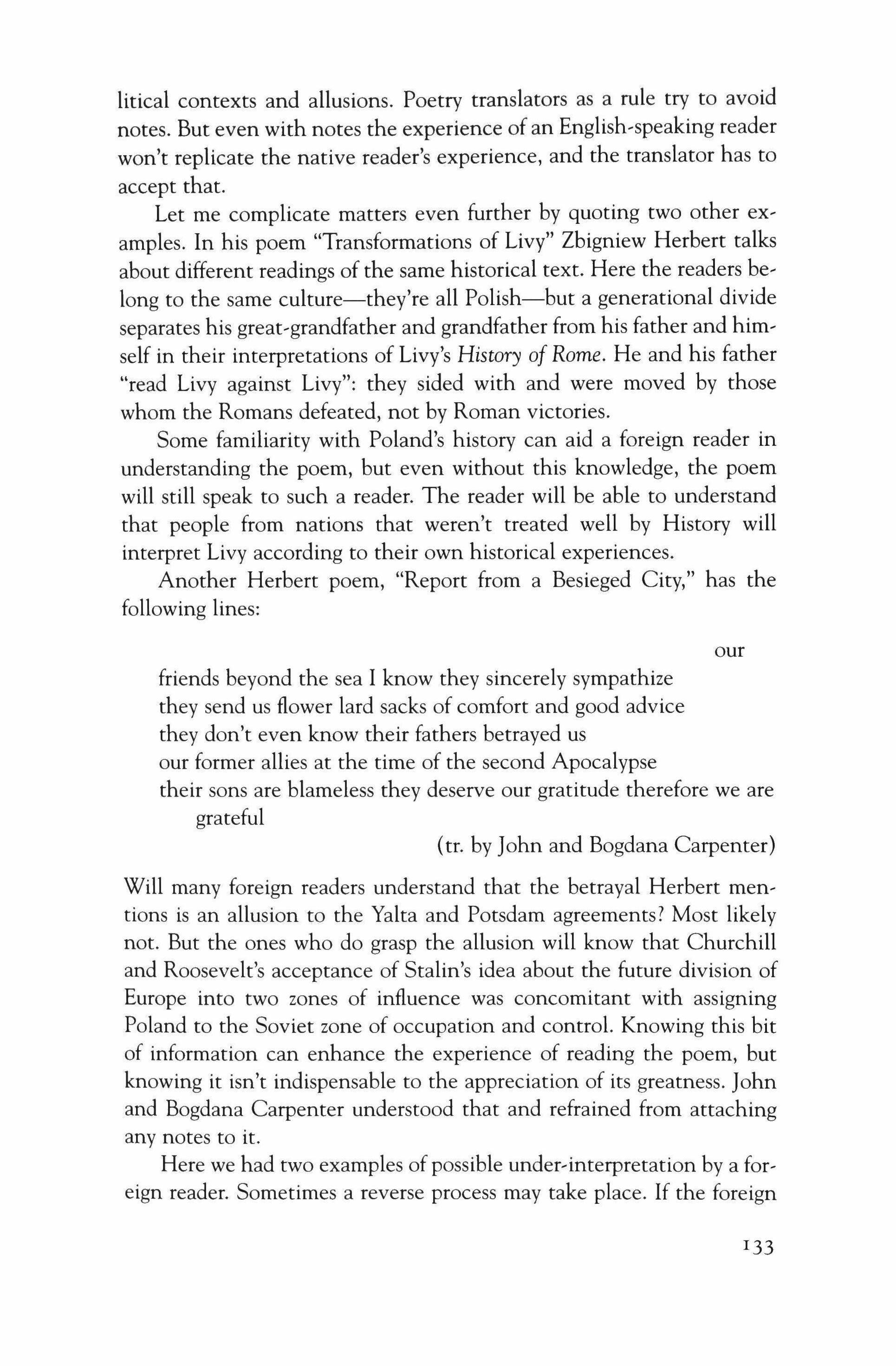
litical contexts and allusions. Poetry translators as a rule try to avoid notes. But even with notes the experience of an English-speaking reader won't replicate the native reader's experience, and the translator has to accept that.
Let me complicate matters even further by quoting two other examples. In his poem "Transformations of Livy" Zbigniew Herbert talks about different readings of the same historical text. Here the readers belong to the same culture-they're all Polish-but a generational divide separates his great-grandfather and grandfather from his father and himself in their interpretations of Livy's History of Rome. He and his father "read Livy against Livy": they sided with and were moved by those whom the Romans defeated, not by Roman victories.
Some familiarity with Poland's history can aid a foreign reader in understanding the poem, but even without this knowledge, the poem will still speak to such a reader. The reader will be able to understand that people from nations that weren't treated well by History will interpret Livy according to their own historical experiences.
Another Herbert poem, "Report from a Besieged City," has the following lines: our
friends beyond the sea I know they sincerely sympathize they send us flower lard sacks of comfort and good advice they don't even know their fathers betrayed us our former allies at the time of the second Apocalypse their sons are blameless they deserve our gratitude therefore we are grateful
(tr. by John and Bogdana Carpenter)
Will many foreign readers understand that the betrayal Herbert mentions is an allusion to the Yalta and Potsdam agreements? Most likely not. But the ones who do grasp the allusion will know that Churchill and Roosevelt's acceptance of Stalin's idea about the future division of Europe into two zones of influence was concomitant with assigning Poland to the Soviet zone of occupation and control. Knowing this bit of information can enhance the experience of reading the poem, but knowing it isn't indispensable to the appreciation of its greatness. John and Bogdana Carpenter understood that and refrained from attaching any notes to it.
Here we had two examples of possible under-interpretation by a foreign reader. Sometimes a reverse process may take place. If the foreign
133
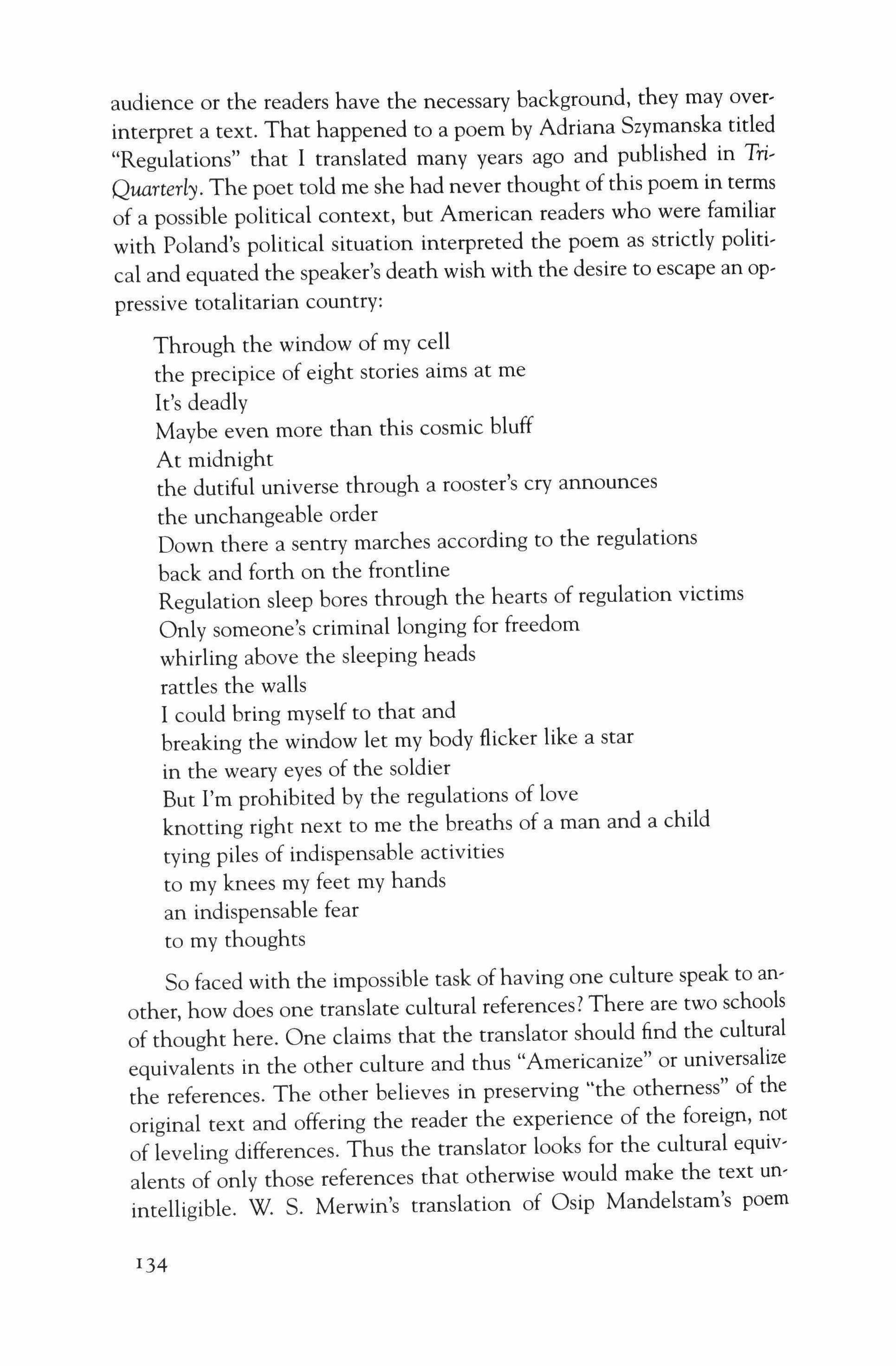
audience or the readers have the necessary background, they may overinterpret a text. That happened to a poem by Adriana Szymanska titled "Regulations" that I translated many years ago and published in TriQuarterly. The poet told me she had never thought ofthis poem in terms of a possible political context, but American readers who were familiar with Poland's political situation interpreted the poem as strictly political and equated the speaker's death wish with the desire to escape an oppressive totalitarian country:
Through the window of my cell the precipice of eight stories aims at me
It's deadly
Maybe even more than this cosmic bluff
At midnight the dutiful universe through a rooster's cry announces the unchangeable order
Down there a sentry marches according to the regulations back and forth on the frontline
Regulation sleep bores through the hearts of regulation victims
Only someone's criminal longing for freedom whirling above the sleeping heads rattles the walls
I could bring myself to that and breaking the window let my body flicker like a star in the weary eyes of the soldier
But I'm prohibited by the regulations of love knotting right next to me the breaths of a man and a child tying piles of indispensable activities to my knees my feet my hands an indispensable fear to my thoughts
So faced with the impossible task ofhaving one culture speak to another, how does one translate cultural references? There are two schools of thought here. One claims that the translator should find the cultural equivalents in the other culture and thus "Americanize" or universalize the references. The other believes in preserving "the otherness" of the original text and offering the reader the experience of the foreign, not of leveling differences. Thus the translator looks for the cultural equivalents of only those references that otherwise would make the text unintelligible. W. S. Merwin's translation of Osip Mandelstam's poem
134
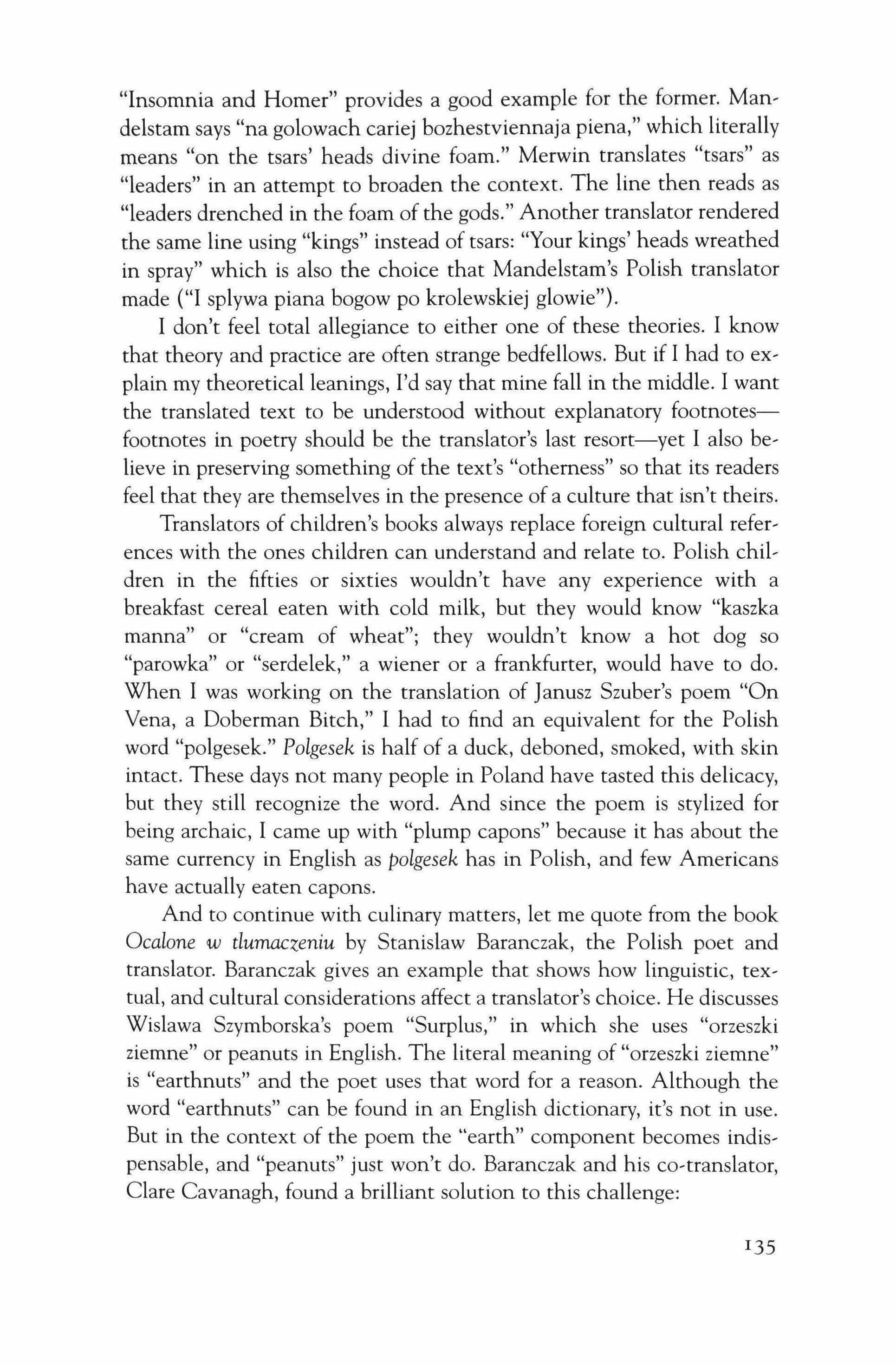
"Insomnia and Homer" provides a good example for the former. Man, delstam says "na golowach cariej bozhestviennaja piena," which literally means "on the tsars' heads divine foam." Merwin translates "tsars" as "leaders" in an attempt to broaden the context. The line then reads as "leaders drenched in the foam of the gods." Another translator rendered the same line using "kings" instead of tsars: "Your kings' heads wreathed in spray" which is also the choice that Mandelstam's Polish translator made ("I splywa piana bogow po krolewskiej glowie"),
I don't feel total allegiance to either one of these theories. I know that theory and practice are often strange bedfellows. But if I had to ex, plain my theoretical leanings, I'd say that mine fall in the middle. I want the translated text to be understood without explanatory footnotesfootnotes in poetry should be the translator's last resort-yet I also be' lieve in preserving something of the text's "otherness" so that its readers feel that they are themselves in the presence of a culture that isn't theirs.
Translators of children's books always replace foreign cultural refer, ences with the ones children can understand and relate to. Polish children in the fifties or sixties wouldn't have any experience with a breakfast cereal eaten with cold milk, but they would know "kaszka manna" or "cream of wheat"; they wouldn't know a hot dog so "parowka" or "serdelek," a wiener or a frankfurter, would have to do. When I was working on the translation of Janusz Szuber's poem "On Vena, a Doberman Bitch," I had to find an equivalent for the Polish word "polgesek." Polgesek is half of a duck, deboned, smoked, with skin intact. These days not many people in Poland have tasted this delicacy, but they still recognize the word. And since the poem is stylized for being archaic, I came up with "plump capons" because it has about the same currency in English as polgesek has in Polish, and few Americans have actually eaten capons.
And to continue with culinary matters, let me quote from the book Ocalone w tlumaczeniu by Stanislaw Baranczak, the Polish poet and translator. Baranczak gives an example that shows how linguistic, textual, and cultural considerations affect a translator's choice. He discusses Wislawa Szymborska's poem "Surplus," in which she uses "orzeszki ziemne" or peanuts in English. The literal meaning of "orzeszki ziemne" is "earthnuts" and the poet uses that word for a reason. Although the word "earthnuts" can be found in an English dictionary, it's not in use. But in the context of the poem the "earth" component becomes indispensable, and "peanuts" just won't do. Baranczak and his co' translator, Clare Cavanagh, found a brilliant solution to this challenge:
135
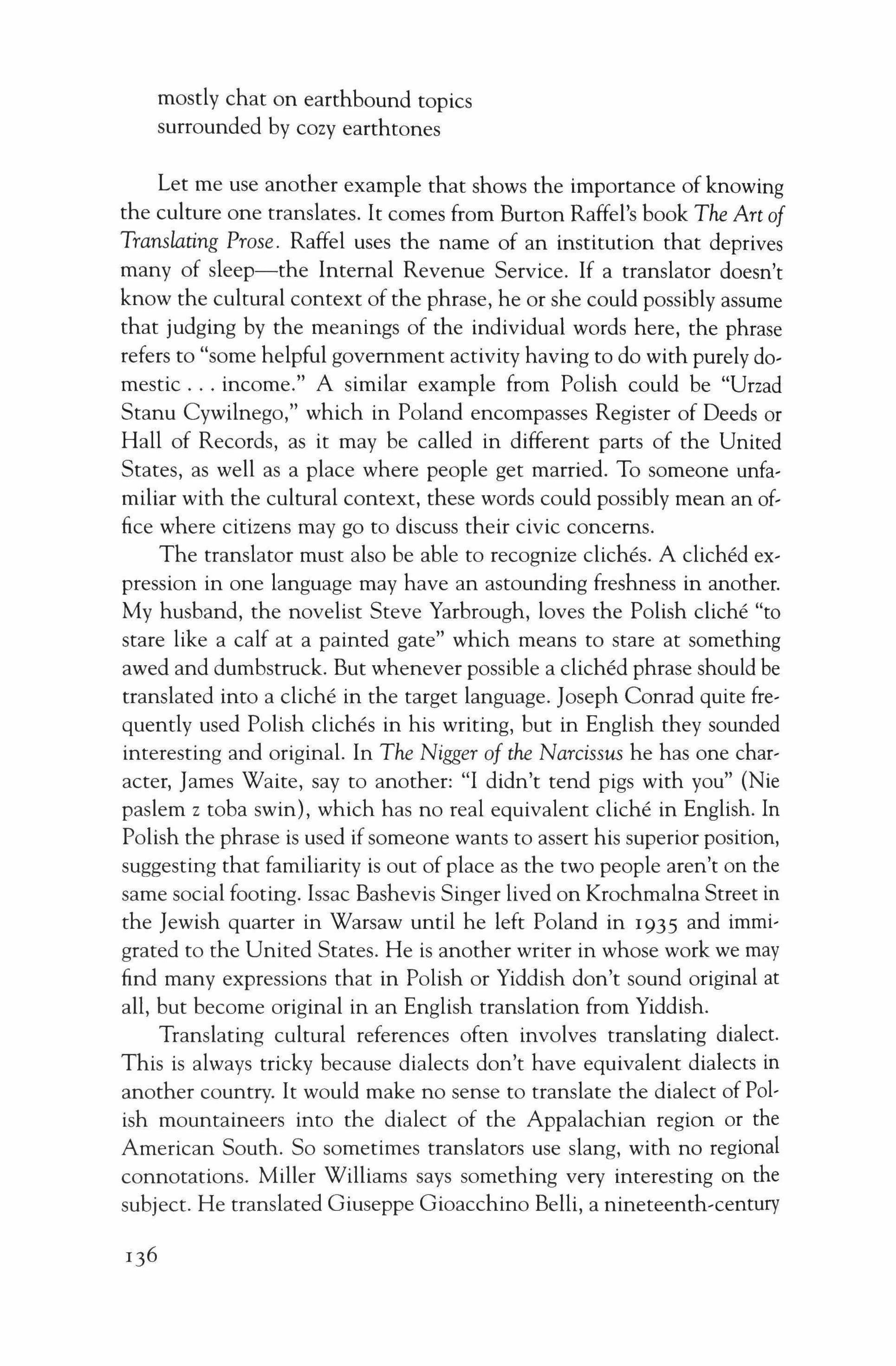
mostly chat on earthbound topics surrounded by cozy earthtones
Let me use another example that shows the importance of knowing the culture one translates. It comes from Burton Raffel's book The Art of Translating Prose. Raffel uses the name of an institution that deprives many of sleep-the Internal Revenue Service. If a translator doesn't know the cultural context of the phrase, he or she could possibly assume that judging by the meanings of the individual words here, the phrase refers to "some helpful government activity having to do with purely domestic income." A similar example from Polish could be "Urzad Stanu Cywilnego," which in Poland encompasses Register of Deeds or Hall of Records, as it may be called in different parts of the United States, as well as a place where people get married. To someone unfamiliar with the cultural context, these words could possibly mean an office where citizens may go to discuss their civic concerns.
The translator must also be able to recognize cliches. A cliched expression in one language may have an astounding freshness in another. My husband, the novelist Steve Yarbrough, loves the Polish cliche "to stare like a calf at a painted gate" which means to stare at something awed and dumbstruck. But whenever possible a cliched phrase should be translated into a cliche in the target language. Joseph Conrad quite frequently used Polish cliches in his writing, but in English they sounded interesting and original. In The Nigger of the Narcissus he has one character, James Waite, say to another: "I didn't tend pigs with you" (Nie paslem z toba swin), which has no real equivalent cliche in English. In Polish the phrase is used if someone wants to assert his superior position, suggesting that familiarity is out of place as the two people aren't on the same social footing. Issac Bashevis Singer lived on Krochmalna Street in the Jewish quarter in Warsaw until he left Poland in 1935 and immigrated to the United States. He is another writer in whose work we may find many expressions that in Polish or Yiddish don't sound original at all, but become original in an English translation from Yiddish.
Translating cultural references often involves translating dialect. This is always tricky because dialects don't have equivalent dialects in another country. It would make no sense to translate the dialect of Polish mountaineers into the dialect of the Appalachian region or the American South. So sometimes translators use slang, with no regional connotations. Miller Williams says something very interesting on the subject. He translated Giuseppe Gioacchino Belli, a nineteenth-century
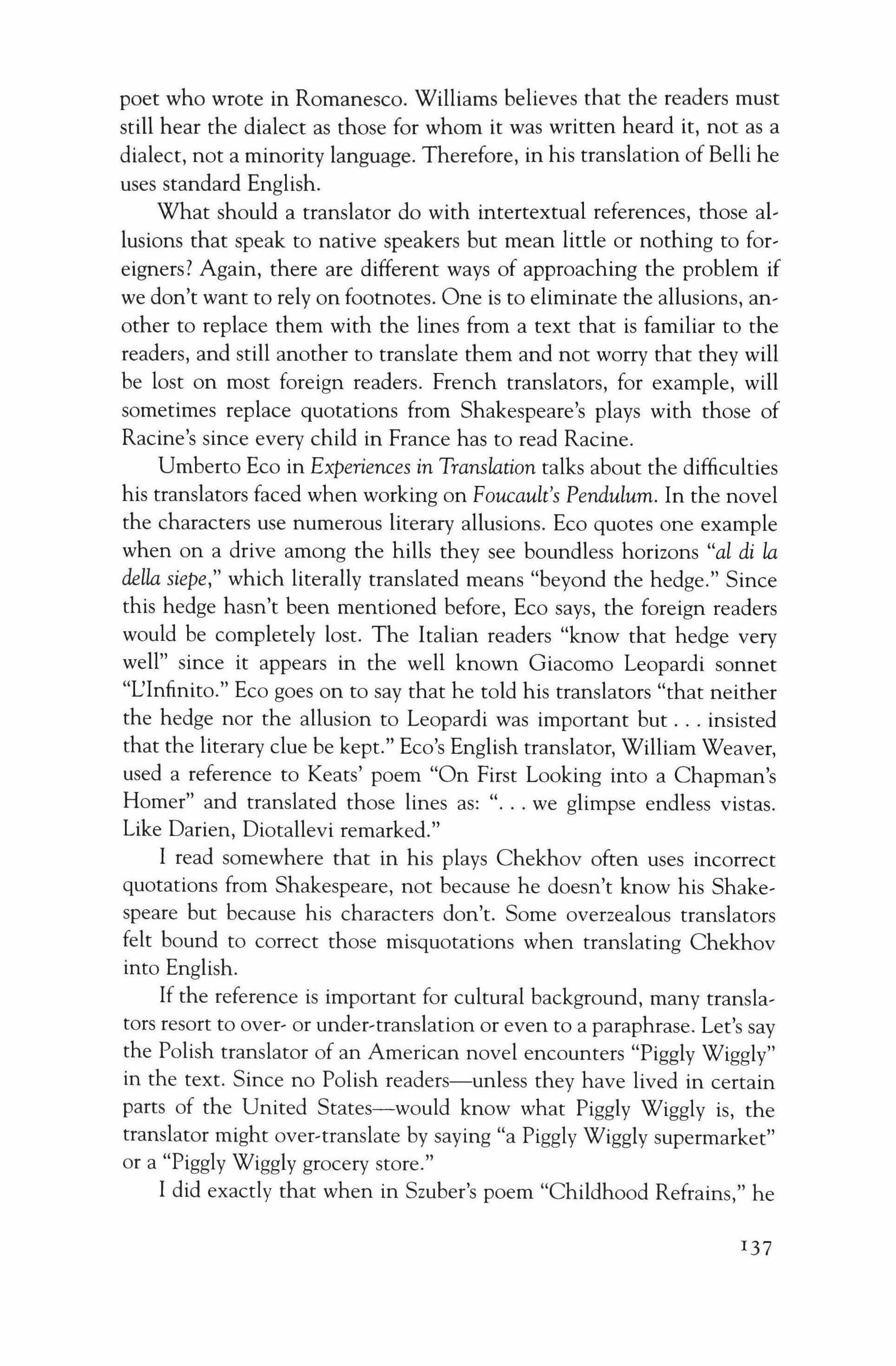
poet who wrote in Romanesco. Williams believes that the readers must still hear the dialect as those for whom it was written heard it, not as a dialect, not a minority language. Therefore, in his translation of Belli he uses standard English.
What should a translator do with intertextual references, those allusions that speak to native speakers but mean little or nothing to foreigners? Again, there are different ways of approaching the problem if we don't want to rely on footnotes. One is to eliminate the allusions, another to replace them with the lines from a text that is familiar to the readers, and still another to translate them and not worry that they will be lost on most foreign readers. French translators, for example, will sometimes replace quotations from Shakespeare's plays with those of Racine's since every child in France has to read Racine.
Umberto Eco in Experiences in Translation talks about the difficulties his translators faced when working on Foucault's Pendulum. In the novel the characters use numerous literary allusions. Eco quotes one example when on a drive among the hills they see boundless horizons "al di la della siepe," which literally translated means "beyond the hedge." Since this hedge hasn't been mentioned before, Eco says, the foreign readers would be completely lost. The Italian readers "know that hedge very well" since it appears in the well known Giacomo Leopardi sonnet "L'lnfinito." Eco goes on to say that he told his translators "that neither the hedge nor the allusion to Leopardi was important but insisted that the literary clue be kept." Eco's English translator, William Weaver, used a reference to Keats' poem "On First Looking into a Chapman's Homer" and translated those lines as: we glimpse endless vistas. Like Darien, Diotallevi remarked."
I read somewhere that in his plays Chekhov often uses incorrect quotations from Shakespeare, not because he doesn't know his Shakespeare but because his characters don't. Some overzealous translators felt bound to correct those misquotations when translating Chekhov into English.
If the reference is important for cultural background, many translators resort to over- or under-translation or even to a paraphrase. Let's say the Polish translator of an American novel encounters "Piggly Wiggly" in the text. Since no Polish readers-unless they have lived in certain parts of the United States-would know what Piggly Wiggly is, the translator might over-translate by saying "a Piggly Wiggly supermarket" or a "Piggly Wiggly grocery store."
I did exactly that when in Szuber's poem "Childhood Refrains," he
137
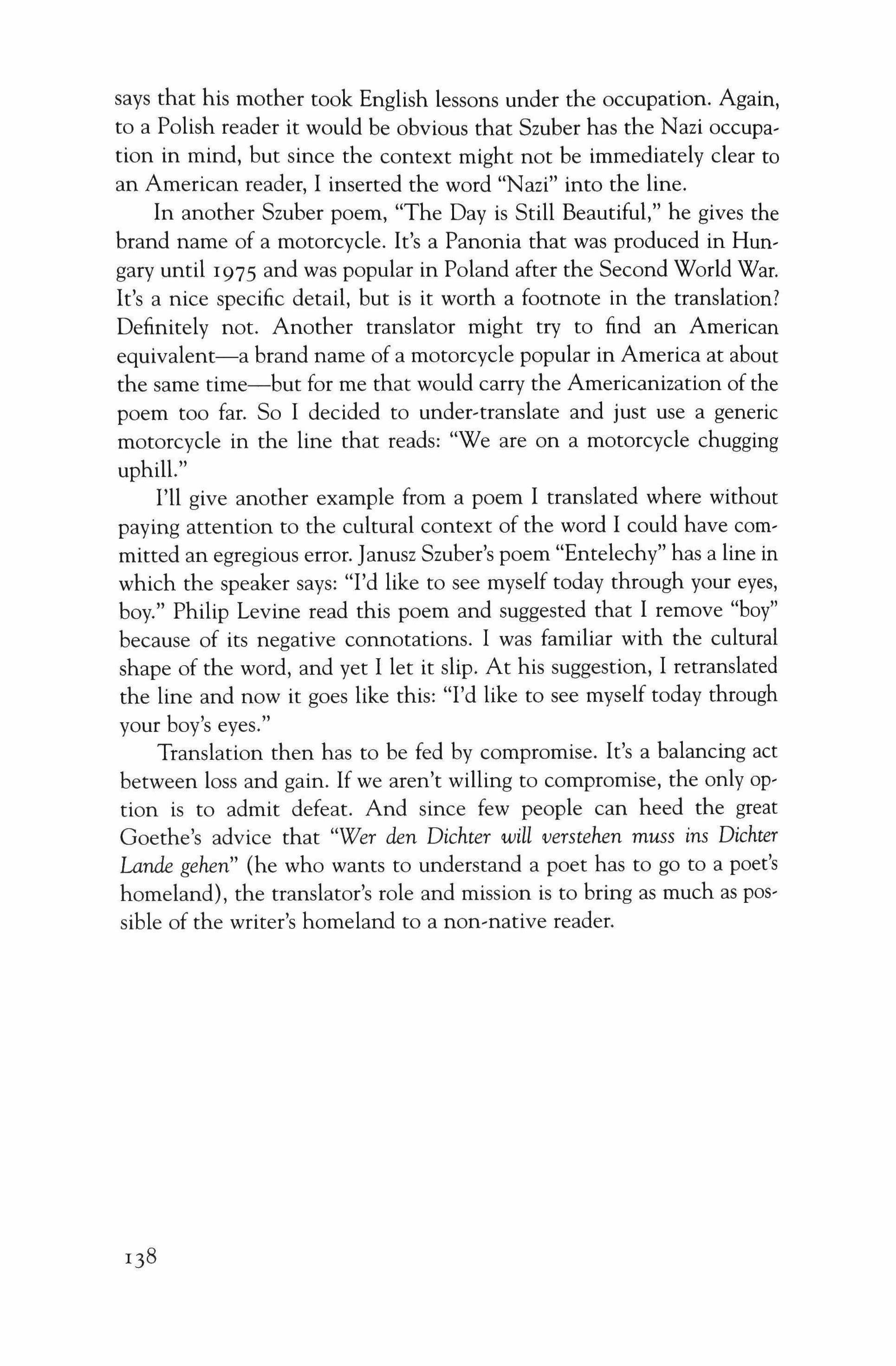
says that his mother took English lessons under the occupation. Again, to a Polish reader it would be obvious that Szuber has the Nazi occupation in mind, but since the context might not be immediately clear to an American reader, I inserted the word "Nazi" into the line.
In another Szuber poem, "The Day is Still Beautiful," he gives the brand name of a motorcycle. It's a Panonia that was produced in Hungary until 1975 and was popular in Poland after the Second World War. It's a nice specific detail, but is it worth a footnote in the translation? Definitely not. Another translator might try to find an American equivalent-a brand name of a motorcycle popular in America at about the same time-but for me that would carry the Americanization of the poem too far. So I decided to under-translate and just use a generic motorcycle in the line that reads: "We are on a motorcycle chugging uphill."
I'll give another example from a poem I translated where without paying attention to the cultural context of the word I could have committed an egregious error. Janusz Szuber's poem "Entelechy" has a line in which the speaker says: "I'd like to see myself today through your eyes, boy." Philip Levine read this poem and suggested that I remove "boy" because of its negative connotations. I was familiar with the cultural shape of the word, and yet I let it slip. At his suggestion, I retranslated the line and now it goes like this: "I'd like to see myself today through your boy's eyes."
Translation then has to be fed by compromise. It's a balancing act between loss and gain. If we aren't willing to compromise, the only option is to admit defeat. And since few people can heed the great Goethe's advice that "Wer den Dichter will verstehen muss ins Dichter Lande gehen" (he who wants to understand a poet has to go to a poet's homeland), the translator's role and mission is to bring as much as possible of the writer's homeland to a non-native reader.
William Olsen
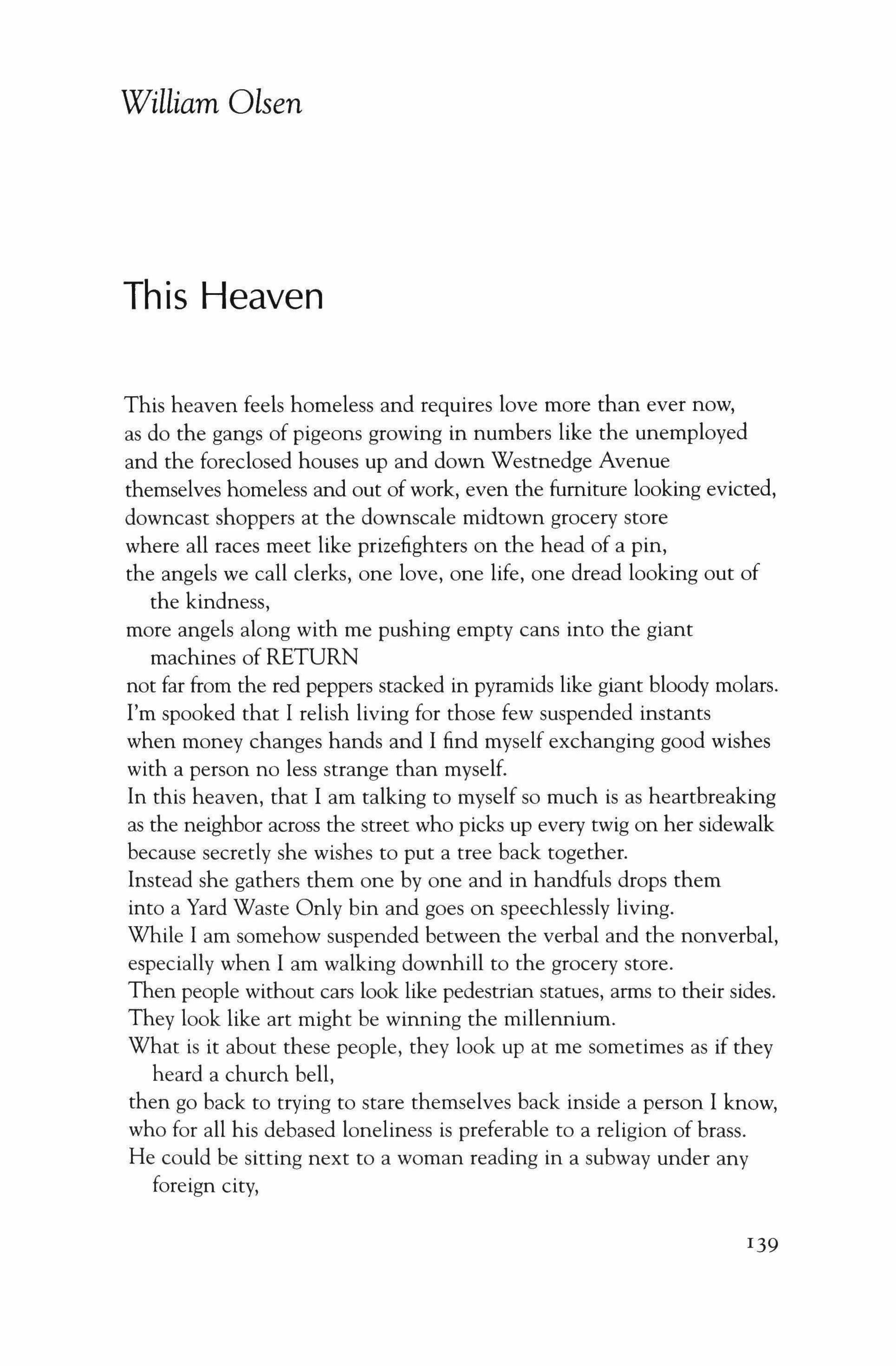
This
Heaven
This heaven feels homeless and requires love more than ever now, as do the gangs of pigeons growing in numbers like the unemployed and the foreclosed houses up and down Westnedge Avenue themselves homeless and out of work, even the furniture looking evicted, downcast shoppers at the downscale midtown grocery store where all races meet like prizefighters on the head of a pin, the angels we call clerks, one love, one life, one dread looking out of the kindness, more angels along with me pushing empty cans into the giant machines of RETURN not far from the red peppers stacked in pyramids like giant bloody molars. I'm spooked that I relish living for those few suspended instants when money changes hands and I find myself exchanging good wishes with a person no less strange than myself. In this heaven, that I am talking to myself so much is as heartbreaking as the neighbor across the street who picks up every twig on her sidewalk because secretly she wishes to put a tree back together. Instead she gathers them one by one and in handfuls drops them into a Yard Waste Only bin and goes on speechlessly living. While I am somehow suspended between the verbal and the nonverbal, especially when I am walking downhill to the grocery store. Then people without cars look like pedestrian statues, arms to their sides. They look like art might be winning the millennium. What is it about these people, they look up at me sometimes as if they heard a church bell, then go back to trying to stare themselves back inside a person I know, who for all his debased loneliness is preferable to a religion of brass. He could be sitting next to a woman reading in a subway under any foreign city,
139
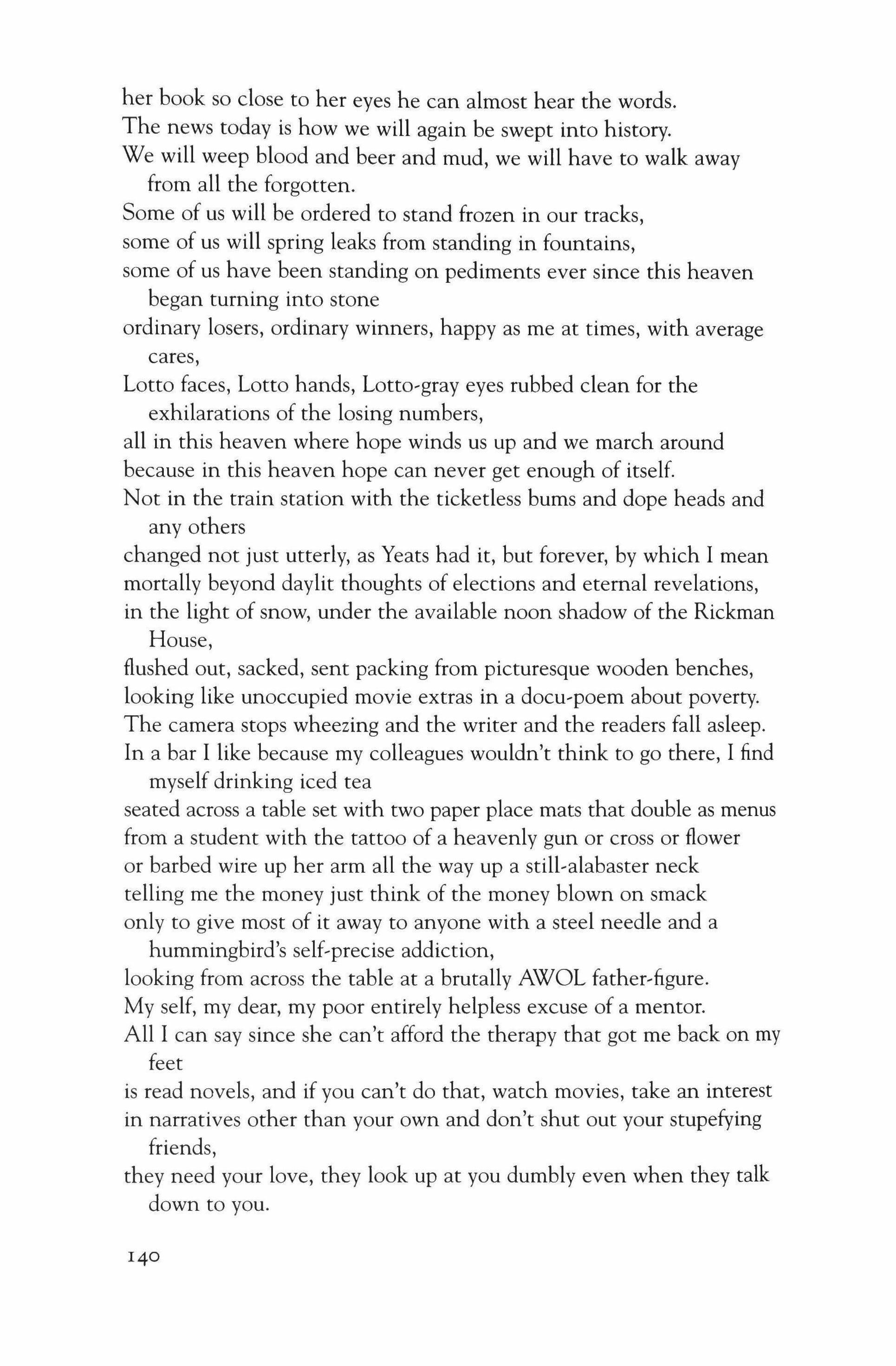
her book so close to her eyes he can almost hear the words. The news today is how we will again be swept into history. We will weep blood and beer and mud, we will have to walk away from all the forgotten.
Some of us will be ordered to stand frozen in our tracks, some of us will spring leaks from standing in fountains, some of us have been standing on pediments ever since this heaven began turning into stone ordinary losers, ordinary winners, happy as me at times, with average cares, Lotto faces, Lotto hands, Lotto-gray eyes rubbed clean for the exhilarations of the losing numbers, all in this heaven where hope winds us up and we march around because in this heaven hope can never get enough of itself.
Not in the train station with the ticketless bums and dope heads and any others changed not just utterly, as Yeats had it, but forever, by which I mean mortally beyond daylit thoughts of elections and eternal revelations, in the light of snow, under the available noon shadow of the Rickman House, flushed out, sacked, sent packing from picturesque wooden benches, looking like unoccupied movie extras in a docu-poem about poverty. The camera stops wheezing and the writer and the readers fall asleep. In a bar I like because my colleagues wouldn't think to go there, I find myself drinking iced tea
seated across a table set with two paper place mats that double as menus from a student with the tattoo of a heavenly gun or cross or flower or barbed wire up her arm all the way up a still-alabaster neck telling me the money just think of the money blown on smack only to give most of it away to anyone with a steel needle and a hummingbird's self-precise addiction, looking from across the table at a brutally AWOL father-figure. My self, my dear, my poor entirely helpless excuse of a mentor. All I can say since she can't afford the therapy that got me back on my feet is read novels, and if you can't do that, watch movies, take an interest in narratives other than your own and don't shut out your stupefying friends, they need your love, they look up at you dumbly even when they talk down to you.
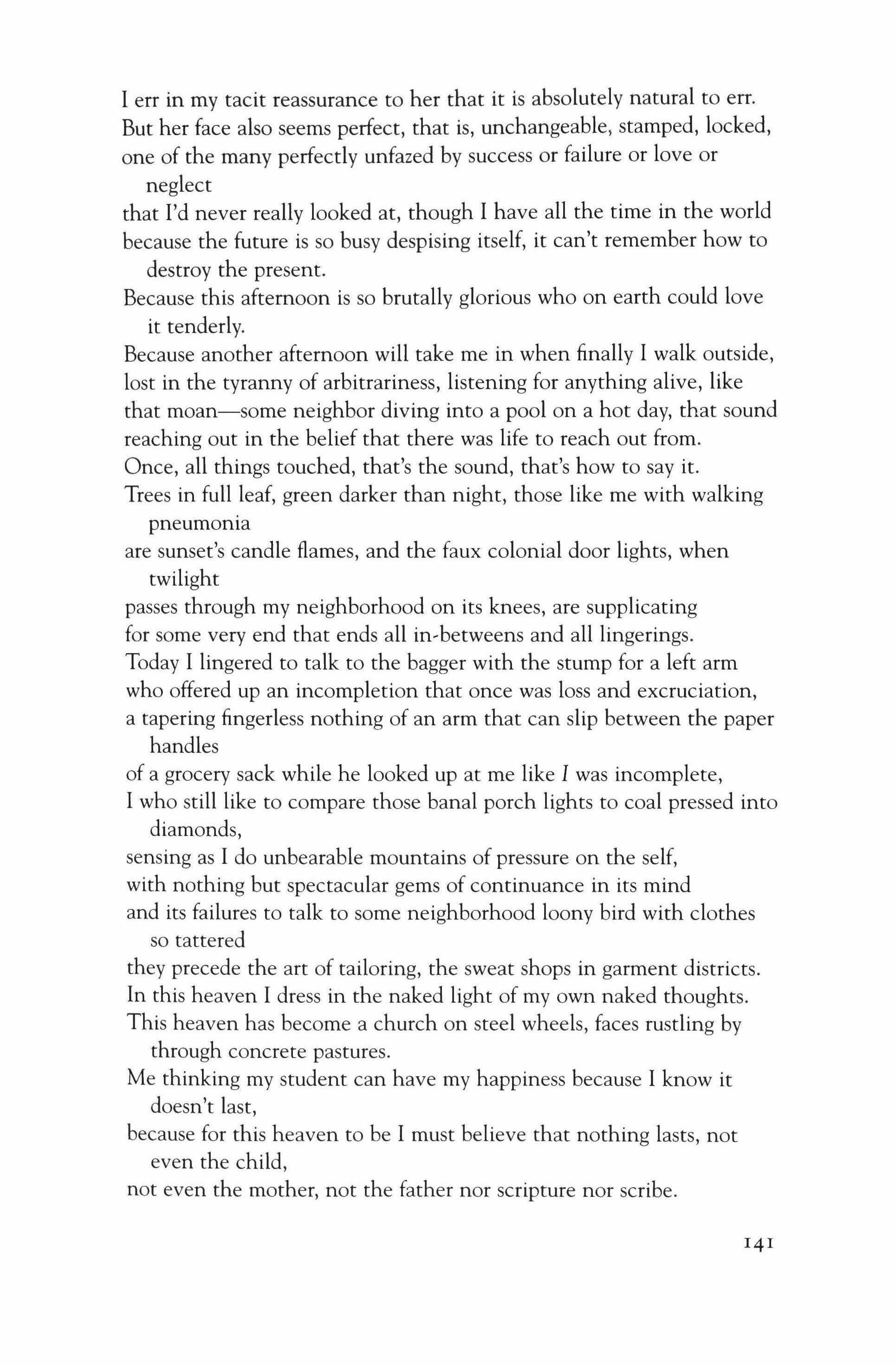
I err in my tacit reassurance to her that it is absolutely natural to err. But her face also seems perfect, that is, unchangeable, stamped, locked, one of the many perfectly unfazed by success or failure or love or neglect
that I'd never really looked at, though I have all the time in the world because the future is so busy despising itself, it can't remember how to destroy the present.
Because this afternoon is so brutally glorious who on earth could love it tenderly.
Because another afternoon will take me in when finally I walk outside, lost in the tyranny of arbitrariness, listening for anything alive, like that moan-some neighbor diving into a pool on a hot day, that sound reaching out in the belief that there was life to reach out from. Once, all things touched, that's the sound, that's how to say it.
Trees in full leaf, green darker than night, those like me with walking pneumonia are sunset's candle flames, and the faux colonial door lights, when twilight passes through my neighborhood on its knees, are supplicating for some very end that ends all in-betweens and alllingerings. Today I lingered to talk to the bagger with the stump for a left arm who offered up an incompletion that once was loss and excruciation, a tapering fingerless nothing of an arm that can slip between the paper handles of a grocery sack while he looked up at me like I was incomplete, I who still like to compare those banal porch lights to coal pressed into diamonds, sensing as I do unbearable mountains of pressure on the self, with nothing but spectacular gems of continuance in its mind and its failures to talk to some neighborhood loony bird with clothes so tattered they precede the art of tailoring, the sweat shops in garment districts. In this heaven I dress in the naked light of my own naked thoughts. This heaven has become a church on steel wheels, faces rustling by through concrete pastures.
Me thinking my student can have my happiness because I know it doesn't last, because for this heaven to be I must believe that nothing lasts, not even the child, not even the mother, not the father nor scripture nor scribe.
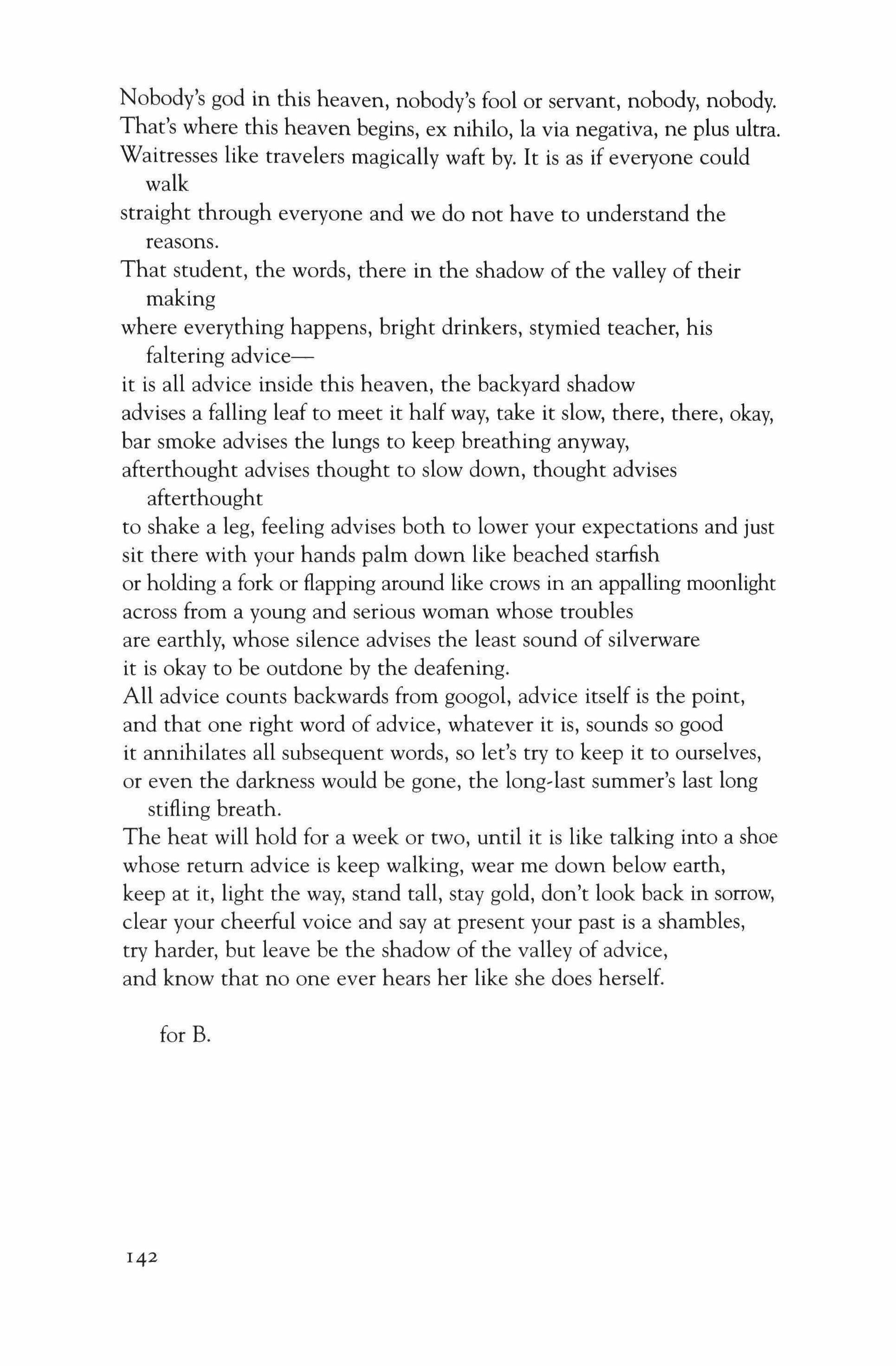
Nobody's god in this heaven, nobody's fool or servant, nobody, nobody. That's where this heaven begins, ex nihilo, la via negativa, ne plus ultra. Waitresses like travelers magically waft by. It is as if everyone could walk straight through everyone and we do not have to understand the reasons.
That student, the words, there in the shadow of the valley of their making where everything happens, bright drinkers, stymied teacher, his faltering adviceit is all advice inside this heaven, the backyard shadow advises a falling leaf to meet it half way, take it slow, there, there, okay, bar smoke advises the lungs to keep breathing anyway, afterthought advises thought to slow down, thought advises afterthought to shake a leg, feeling advises both to lower your expectations and just sit there with your hands palm down like beached starfish or holding a fork or flapping around like crows in an appalling moonlight across from a young and serious woman whose troubles are earthly, whose silence advises the least sound of silverware it is okay to be outdone by the deafening. All advice counts backwards from googol, advice itself is the point, and that one right word of advice, whatever it is, sounds so good it annihilates all subsequent words, so let's try to keep it to ourselves, or even the darkness would be gone, the long-last summer's last long stifling breath.
The heat will hold for a week or two, until it is like talking into a shoe whose return advice is keep walking, wear me down below earth, keep at it, light the way, stand tall, stay gold, don't look back in sorrow, clear your cheerful voice and say at present your past is a shambles, try harder, but leave be the shadow of the valley of advice, and know that no one ever hears her like she does herself.
for B.
Sand Theory
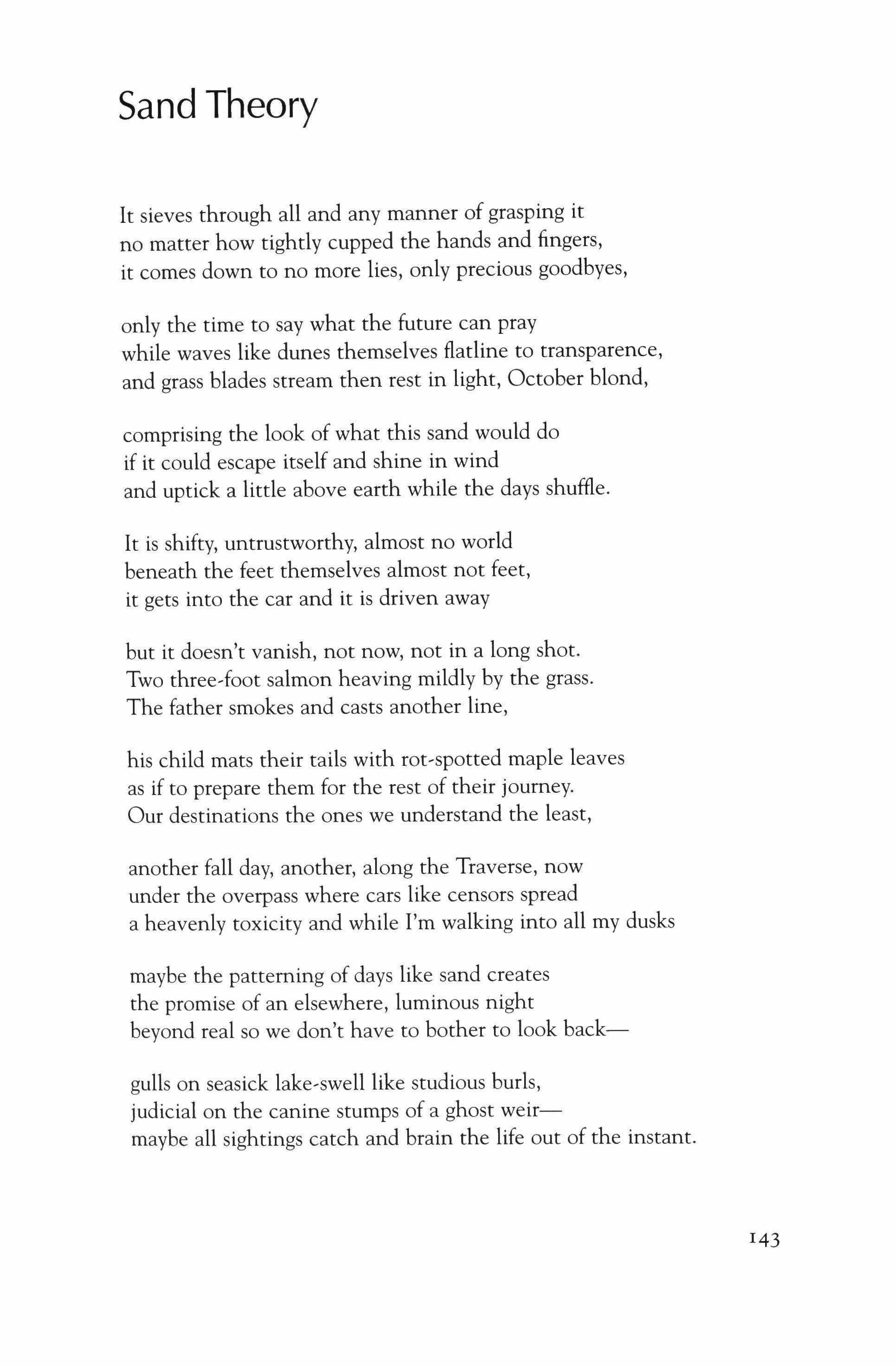
It sieves through all and any manner of grasping it no matter how tightly cupped the hands and fingers, it comes down to no more lies, only precious goodbyes,
only the time to say what the future can pray while waves like dunes themselves flatline to transparence, and grass blades stream then rest in light, October blond,
comprising the look of what this sand would do if it could escape itself and shine in wind and uptick a little above earth while the days shuffle.
It is shifty, untrustworthy, almost no world beneath the feet themselves almost not feet, it gets into the car and it is driven away
but it doesn't vanish, not now, not in a long shot. Two three-foot salmon heaving mildly by the grass. The father smokes and casts another line,
his child mats their tails with rot-spotted maple leaves as if to prepare them for the rest of their journey. Our destinations the ones we understand the least,
another fall day, another, along the Traverse, now under the overpass where cars like censors spread a heavenly toxicity and while I'm walking into all my dusks
maybe the patterning of days like sand creates the promise of an elsewhere, luminous night beyond real so we don't have to bother to look back-
gulls on seasick lake-swell like studious burls, judicial on the canine stumps of a ghost weirmaybe all sightings catch and brain the life out of the instant.
143
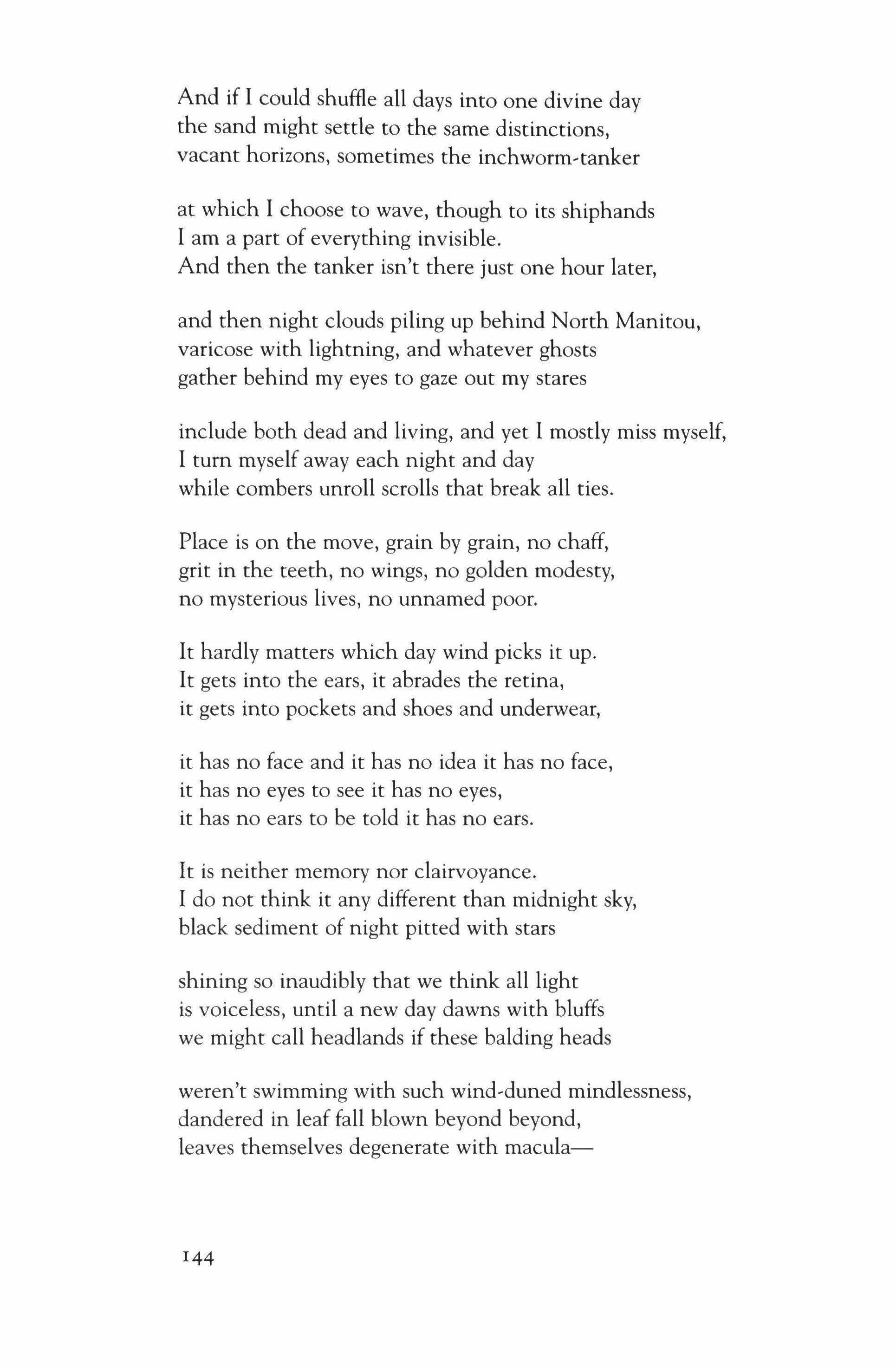
And if I could shuffle all days into one divine day the sand might settle to the same distinctions, vacant horizons, sometimes the inchworm-tanker
at which I choose to wave, though to its shiphands I am a part of everything invisible. And then the tanker isn't there just one hour later, and then night clouds piling up behind North Manitou, varicose with lightning, and whatever ghosts gather behind my eyes to gaze out my stares
include both dead and living, and yet I mostly miss myself, I tum myself away each night and day while combers unroll scrolls that break all ties.
Place is on the move, grain by grain, no chaff, grit in the teeth, no wings, no golden modesty, no mysterious lives, no unnamed poor.
It hardly matters which day wind picks it up. It gets into the ears, it abrades the retina, it gets into pockets and shoes and underwear,
it has no face and it has no idea it has no face, it has no eyes to see it has no eyes, it has no ears to be told it has no ears.
It is neither memory nor clairvoyance. I do not think it any different than midnight sky, black sediment of night pitted with stars
shining so inaudibly that we think all light is voiceless, until a new day dawns with bluffs we might call headlands if these balding heads
weren't swimming with such wind-duned mindlessness, dandered in leaf fall blown beyond beyond, leaves themselves degenerate with macula-
144
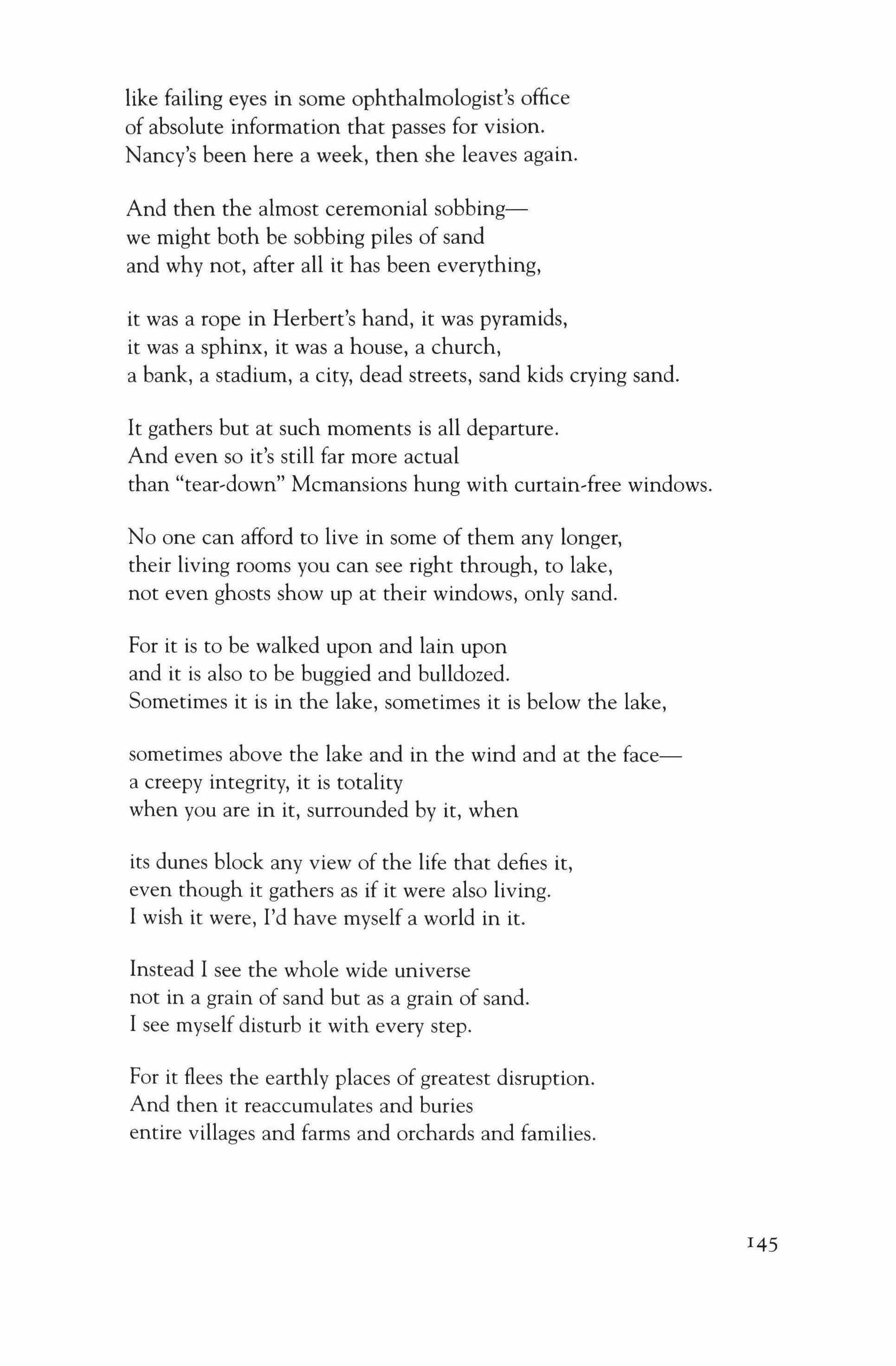
like failing eyes in some ophthalmologist's office of absolute information that passes for vision. Nancy's been here a week, then she leaves again.
And then the almost ceremonial sobbingwe might both be sobbing piles of sand and why not, after all it has been everything,
it was a rope in Herbert's hand, it was pyramids, it was a sphinx, it was a house, a church, a bank, a stadium, a city, dead streets, sand kids crying sand.
It gathers but at such moments is all departure. And even so it's still far more actual than "tear-down" Mcmansions hung with curtain,free windows.
No one can afford to live in some of them any longer, their living rooms you can see right through, to lake, not even ghosts show up at their windows, only sand.
For it is to be walked upon and lain upon and it is also to be buggied and bulldozed. Sometimes it is in the lake, sometimes it is below the lake, sometimes above the lake and in the wind and at the facea creepy integrity, it is totality when you are in it, surrounded by it, when its dunes block any view of the life that defies it, even though it gathers as if it were also living. I wish it were, I'd have myself a world in it.
Instead I see the whole wide universe not in a grain of sand but as a grain of sand. I see myself disturb it with every step.
For it flees the earthly places of greatest disruption. And then it reaccumulates and buries entire villages and farms and orchards and families.
145
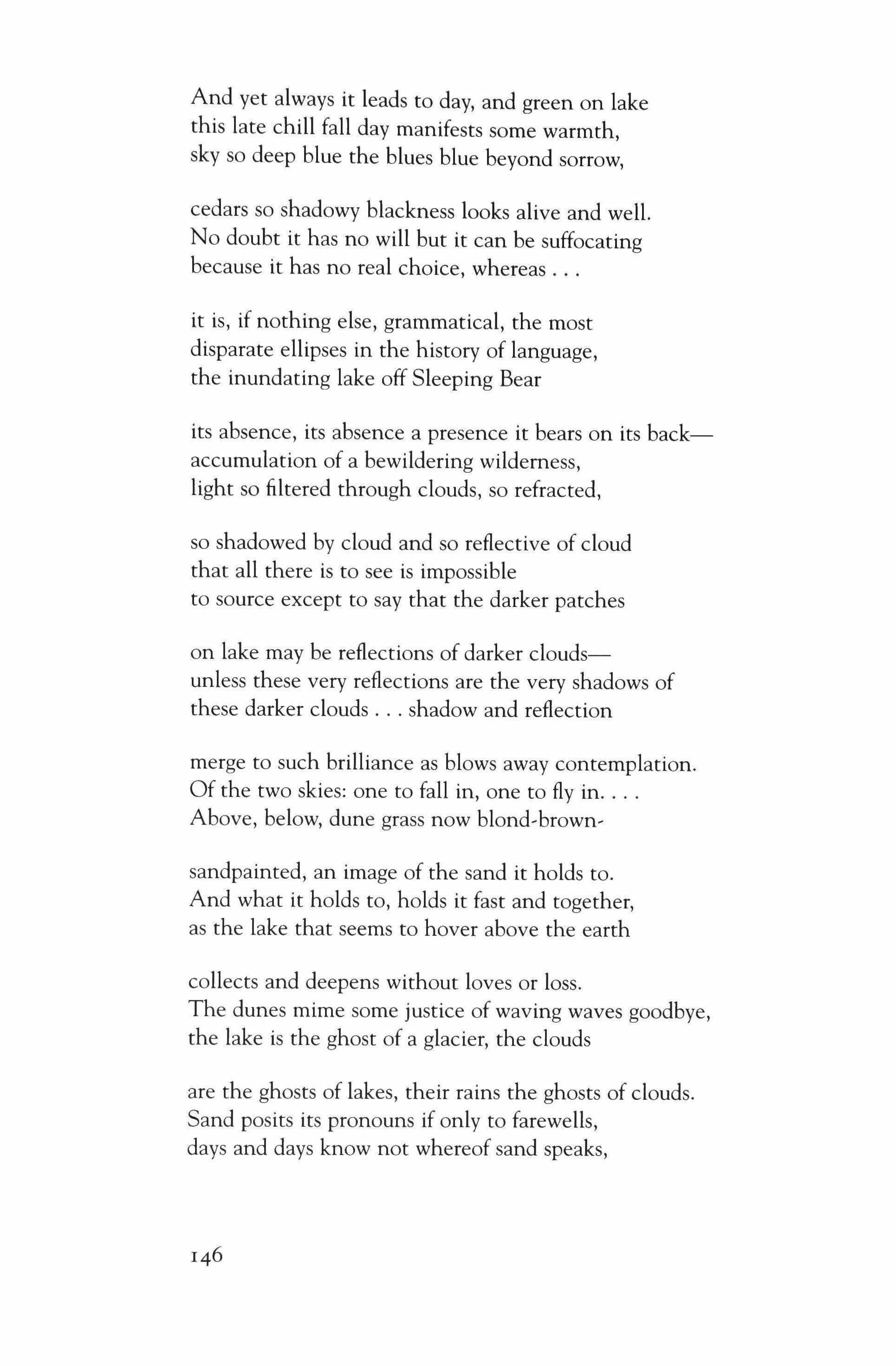
And yet always it leads to day, and green on lake this late chill fall day manifests some warmth, sky so deep blue the blues blue beyond sorrow,
cedars so shadowy blackness looks alive and well. No doubt it has no will but it can be suffocating because it has no real choice, whereas
it is, if nothing else, grammatical, the most disparate ellipses in the history of language, the inundating lake off Sleeping Bear
its absence, its absence a presence it bears on its backaccumulation of a bewildering wilderness, light so filtered through clouds, so refracted, so shadowed by cloud and so reflective of cloud that all there is to see is impossible to source except to say that the darker patches on lake may be reflections of darker cloudsunless these very reflections are the very shadows of these darker clouds shadow and reflection
merge to such brilliance as blows away contemplation. Of the two skies: one to fall in, one to fly in Above, below, dune grass now blond-brown-
sandpainted, an image of the sand it holds to. And what it holds to, holds it fast and together, as the lake that seems to hover above the earth collects and deepens without loves or loss. The dunes mime some justice of waving waves goodbye, the lake is the ghost of a glacier, the clouds are the ghosts of lakes, their rains the ghosts of clouds. Sand posits its pronouns if only to farewells, days and days know not whereof sand speaks,
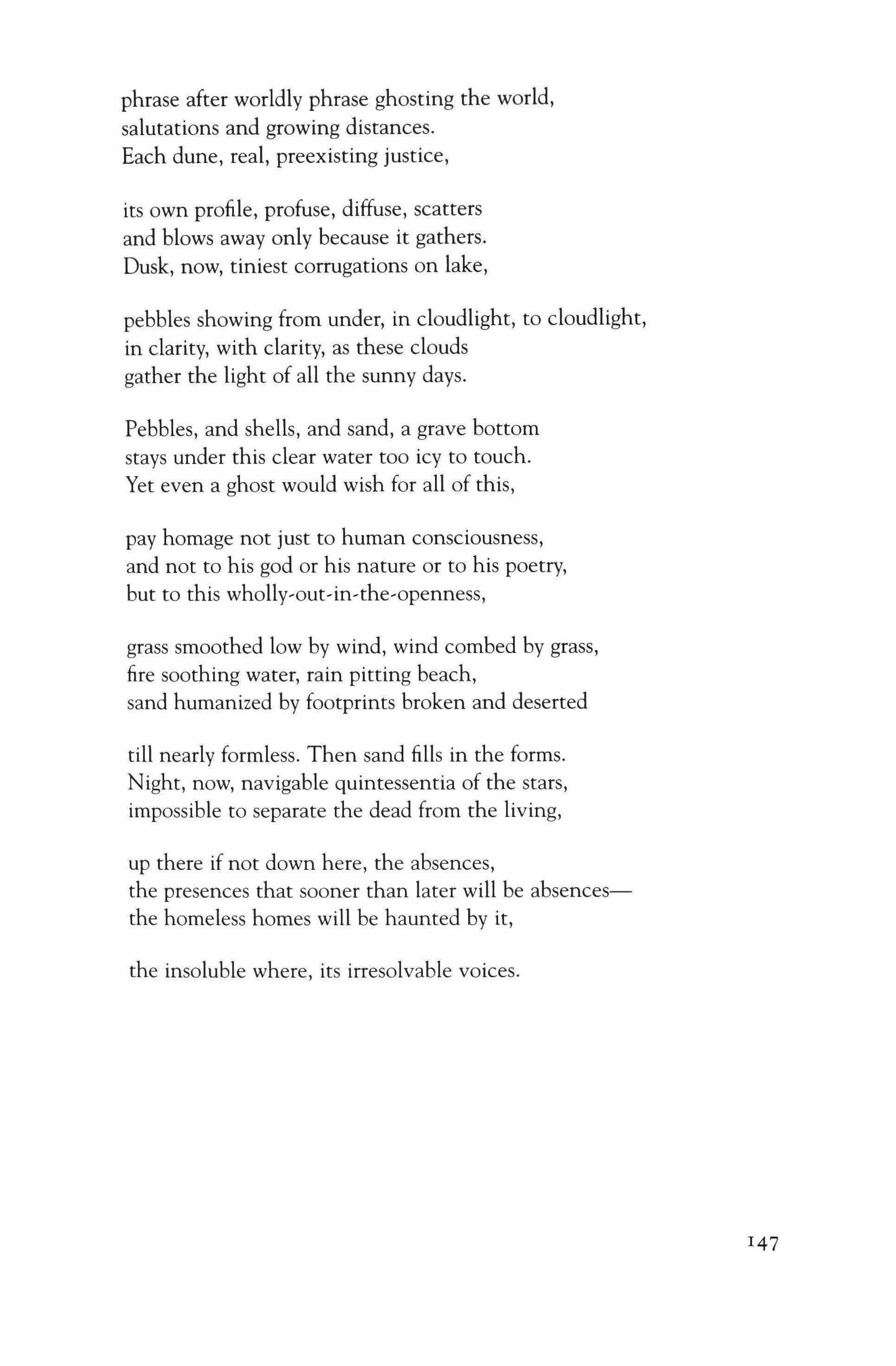
phrase after worldly phrase ghosting the world, salutations and growing distances. Each dune, real, preexisting justice, its own profile, profuse, diffuse, scatters and blows away only because it gathers. Dusk, now, tiniest corrugations on lake,
pebbles showing from under, in cloudlight, to cloudlight, in clarity, with clarity, as these clouds gather the light of all the sunny days.
Pebbles, and shells, and sand, a grave bottom stays under this clear water too icy to touch. Yet even a ghost would wish for all of this,
pay homage not just to human consciousness, and not to his god or his nature or to his poetry, but to this wholly-out-in-the-openness,
grass smoothed low by wind, wind combed by grass, fire soothing water, rain pitting beach, sand humanized by footprints broken and deserted
till nearly formless. Then sand fills in the forms. Night, now, navigable quintessentia of the stars, impossible to separate the dead from the living,
up there if not down here, the absences, the presences that sooner than later will be absencesthe homeless homes will be haunted by it,
the insoluble where, its irresolvable voices.
147
Those Yachts
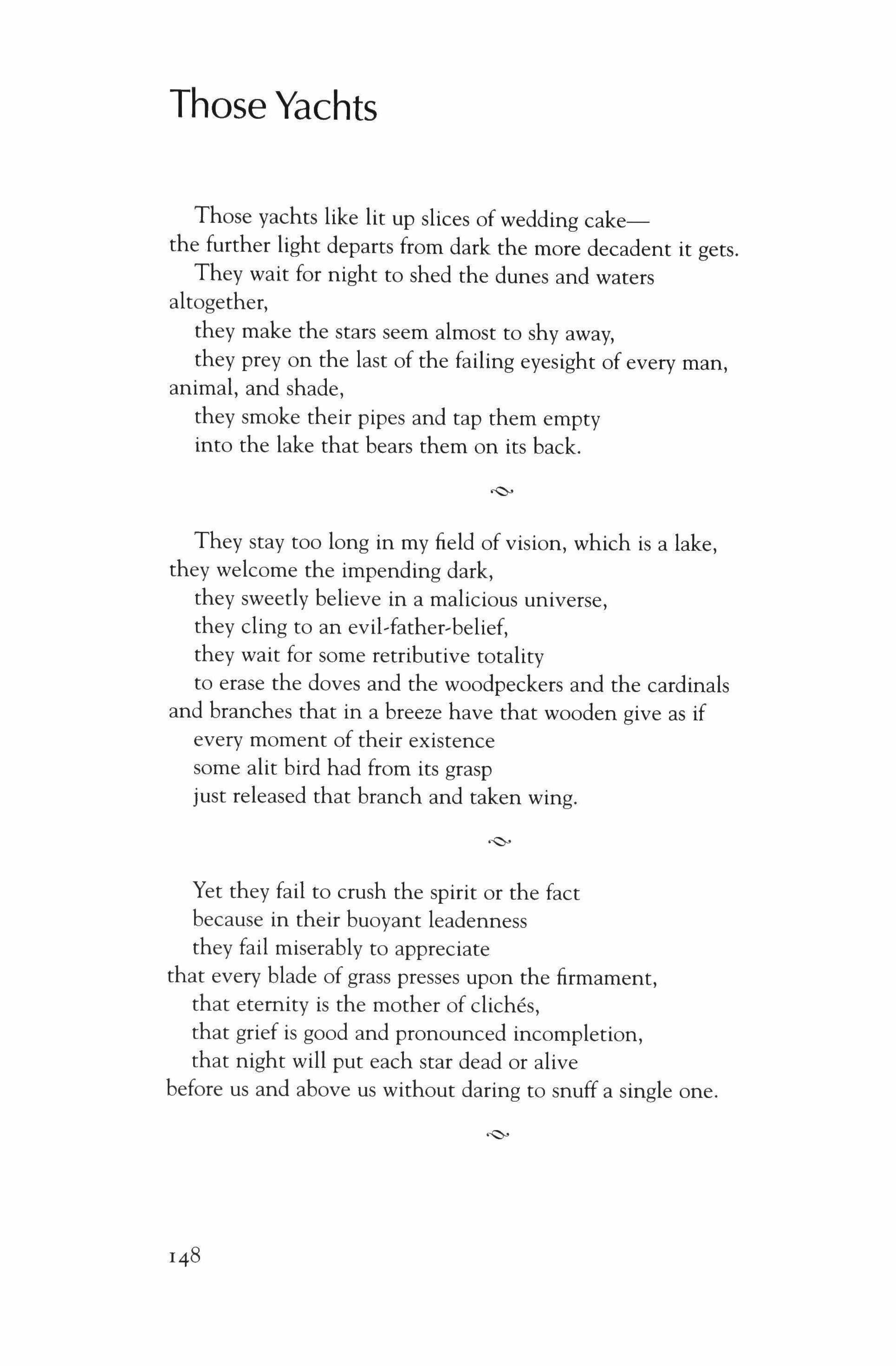
Those yachts like lit up slices of wedding cakethe further light departs from dark the more decadent it gets. They wait for night to shed the dunes and waters altogether, they make the stars seem almost to shy away, they prey on the last of the failing eyesight of every man, animal, and shade, they smoke their pipes and tap them empty into the lake that bears them on its back.
They stay too long in my field of vision, which is a lake, they welcome the impending dark, they sweetly believe in a malicious universe, they cling to an evil-father-belief, they wait for some retributive totality to erase the doves and the woodpeckers and the cardinals and branches that in a breeze have that wooden give as if every moment of their existence some alit bird had from its grasp just released that branch and taken wing.
Yet they fail to crush the spirit or the fact because in their buoyant leadenness they fail miserably to appreciate that every blade of grass presses upon the firmament, that eternity is the mother of cliches, that grief is good and pronounced incompletion, that night will put each star dead or alive before us and above us without daring to snuff a single one.
148
Eyes snail across such spans as these, and perhaps saying so casts the shadow of heaven like punishment across those yachts. And sends them into oblivion. But then this dream of justice subsides, and their glamorous lights appear again. It is twilight and soon not even mirrors will give sunlight back, not even their cousins the lakes and rivers will scramble it, not even books will talk it back to life.
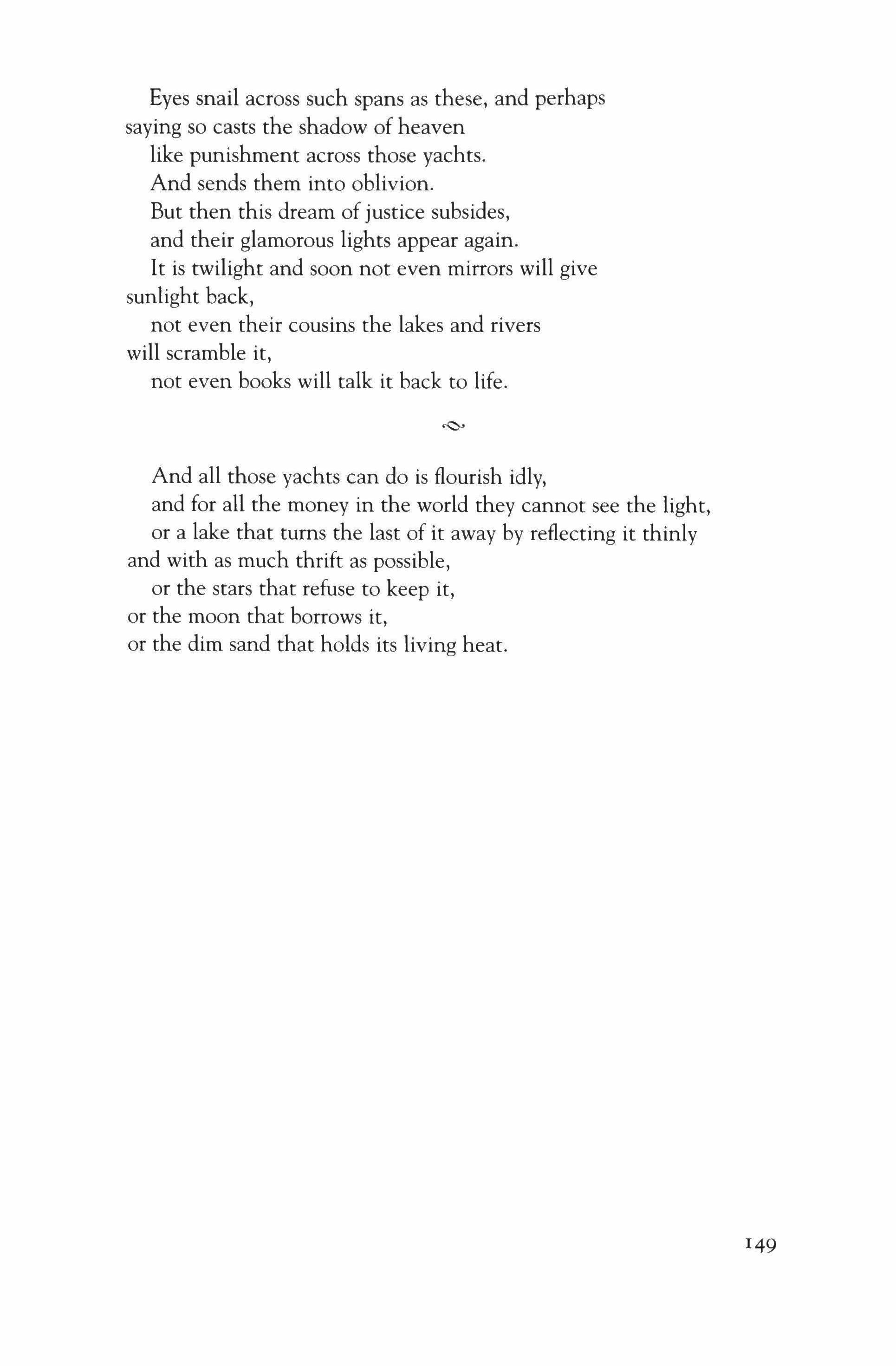
And all those yachts can do is flourish idly, and for all the money in the world they cannot see the light, or a lake that turns the last of it away by reflecting it thinly and with as much thrift as possible, or the stars that refuse to keep it, or the moon that borrows it, or the dim sand that holds its living heat.
149
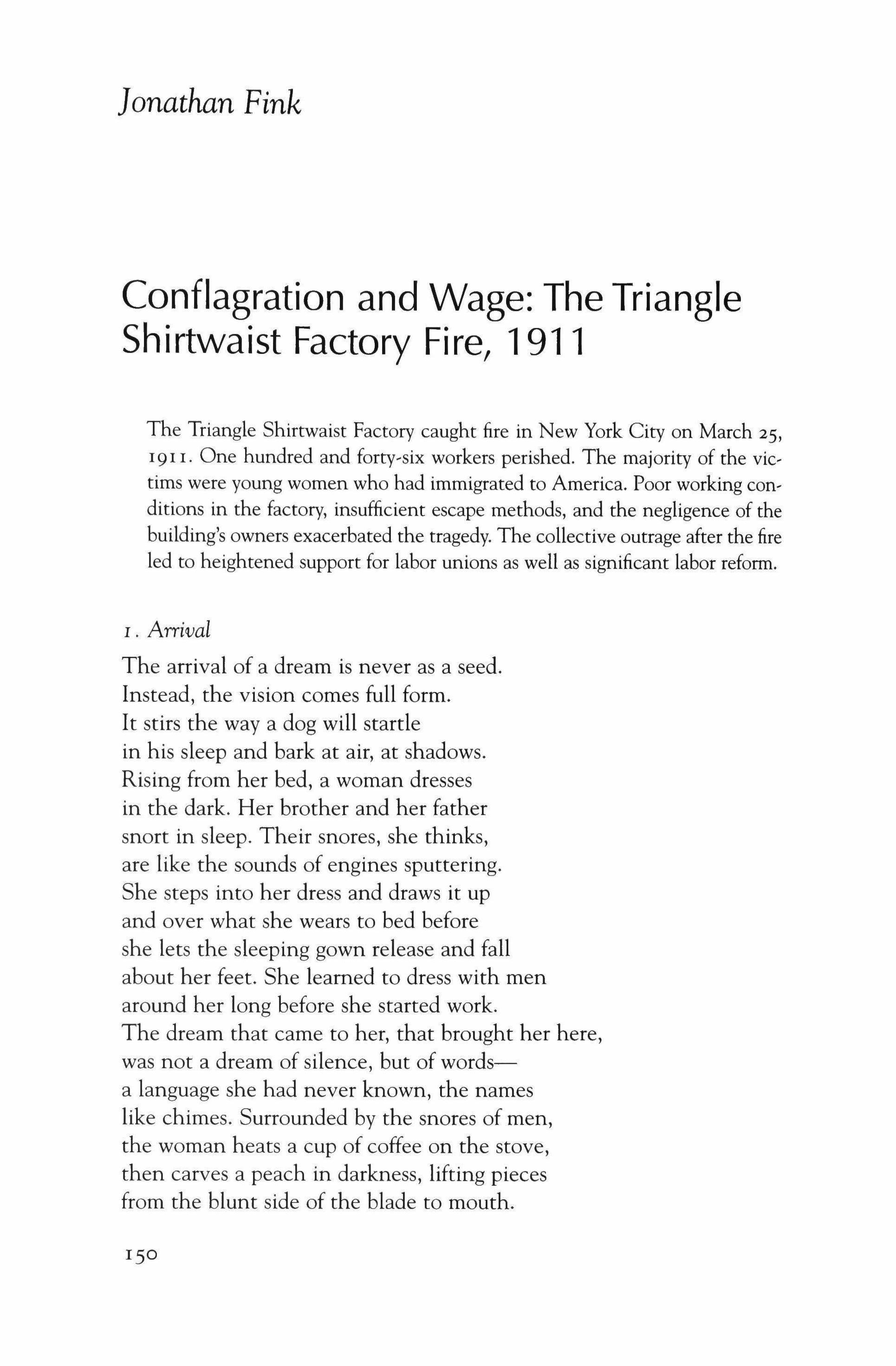
Conflagration and Wage: The Triangle Shirtwaist Factory Fire, 1911
The Triangle Shirtwaist Factory caught fire in New York City on March 25, 191 I. One hundred and forty-six workers perished. The majority of the victims were young women who had immigrated to America. Poor working conditions in the factory, insufficient escape methods, and the negligence of the building's owners exacerbated the tragedy. The collective outrage after the fire led to heightened support for labor unions as well as significant labor reform.
I. Arrival
The arrival of a dream is never as a seed. Instead, the vision comes full form. It stirs the way a dog will startle in his sleep and bark at air, at shadows. Rising from her bed, a woman dresses in the dark. Her brother and her father snort in sleep. Their snores, she thinks, are like the sounds of engines sputtering. She steps into her dress and draws it up and over what she wears to bed before she lets the sleeping gown release and fall about her feet. She learned to dress with men around her long before she started work. The dream that came to her, that brought her here, was not a dream of silence, but of wordsa language she had never known, the names like chimes. Surrounded by the snores of men, the woman heats a cup of coffee on the stove, then carves a peach in darkness, lifting pieces from the blunt side of the blade to mouth.
onathan
]
Fink
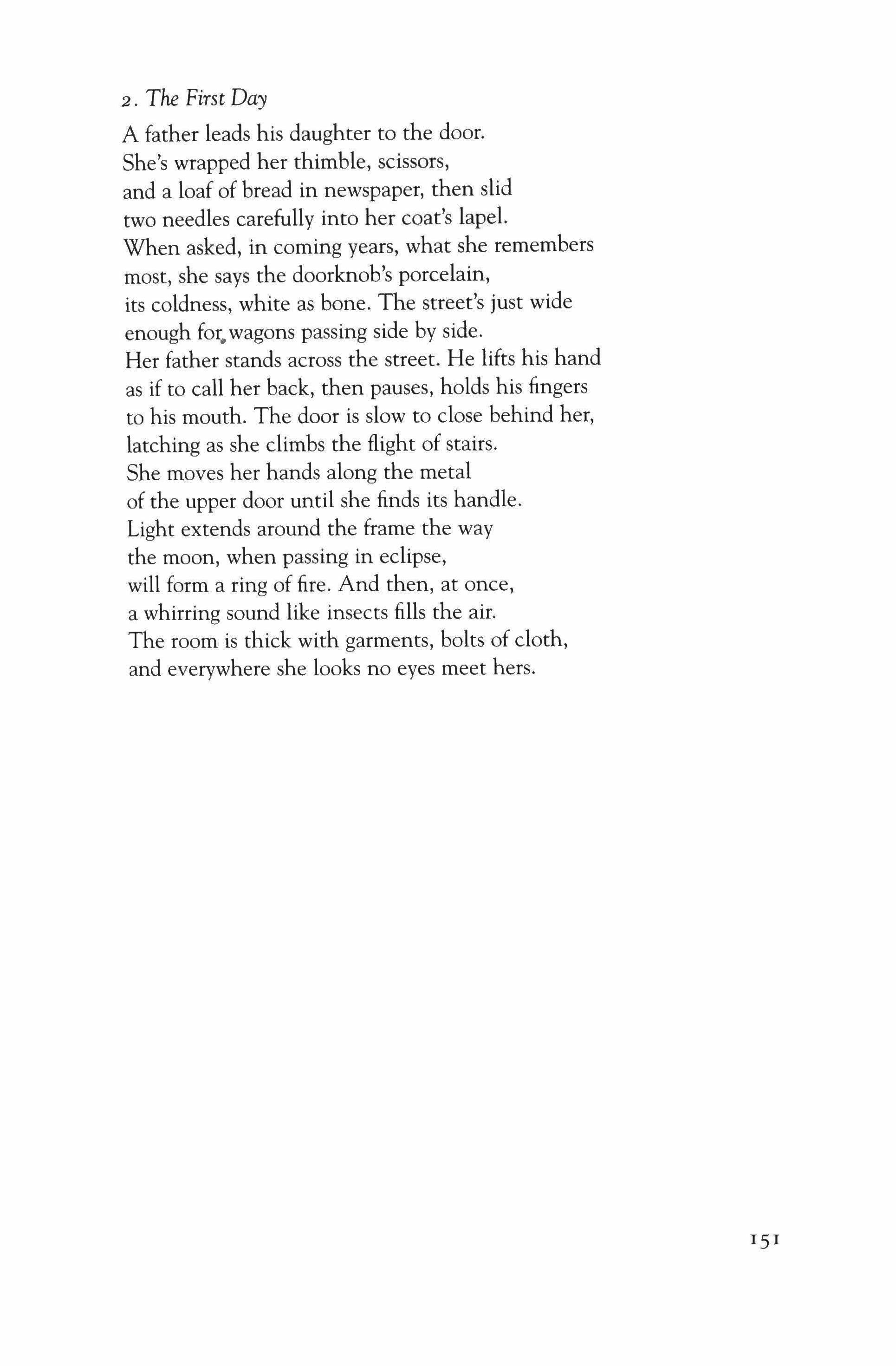
2. The First Day
A father leads his daughter to the door. She's wrapped her thimble, scissors, and a loaf of bread in newspaper, then slid two needles carefully into her coat's lapel. When asked, in coming years, what she remembers most, she says the doorknob's porcelain, its coldness, white as bone. The street's just wide enough for.wagons passing side by side. Her father stands across the street. He lifts his hand as if to call her back, then pauses, holds his fingers to his mouth. The door is slow to close behind her, latching as she climbs the flight of stairs. She moves her hands along the metal of the upper door until she finds its handle. Light extends around the frame the way the moon, when passing in eclipse, will form a ring of fire. And then, at once, a whirring sound like insects fills the air. The room is thick with garments, bolts of cloth, and everywhere she looks no eyes meet hers.
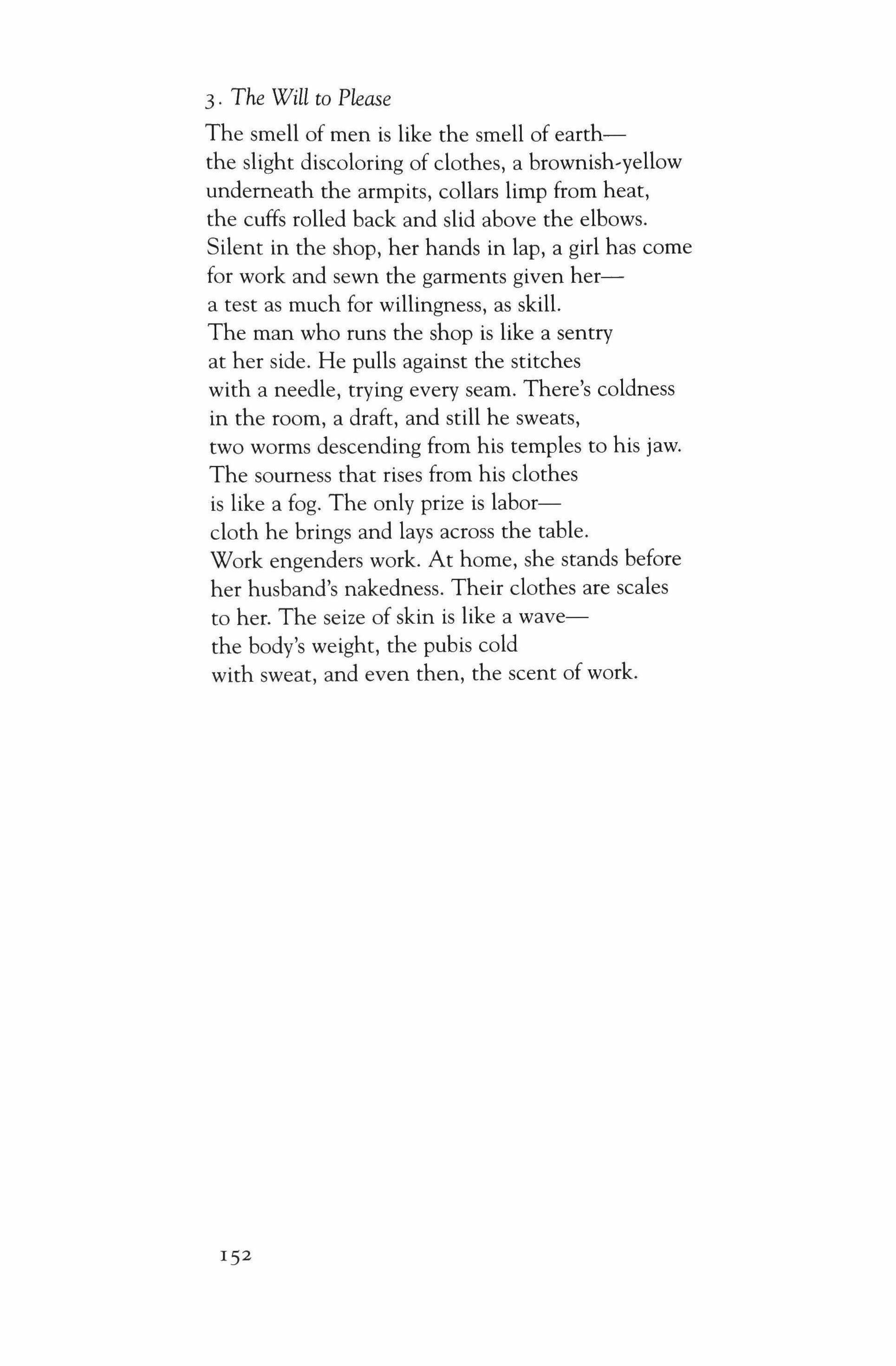
3. The Will to Please
The smell of men is like the smell of earththe slight discoloring of clothes, a brownish-yellow underneath the armpits, collars limp from heat, the cuffs rolled back and slid above the elbows. Silent in the shop, her hands in lap, a girl has come for work and sewn the garments given hera test as much for willingness, as skill. The man who runs the shop is like a sentry at her side. He pulls against the stitches with a needle, trying every seam. There's coldness in the room, a draft, and still he sweats, two worms descending from his temples to his jaw. The sourness that rises from his clothes is like a fog. The only prize is laborcloth he brings and lays across the table. Work engenders work. At home, she stands before her husband's nakedness. Their clothes are scales to her. The seize of skin is like a wavethe body's weight, the pubis cold with sweat, and even then, the scent of work.
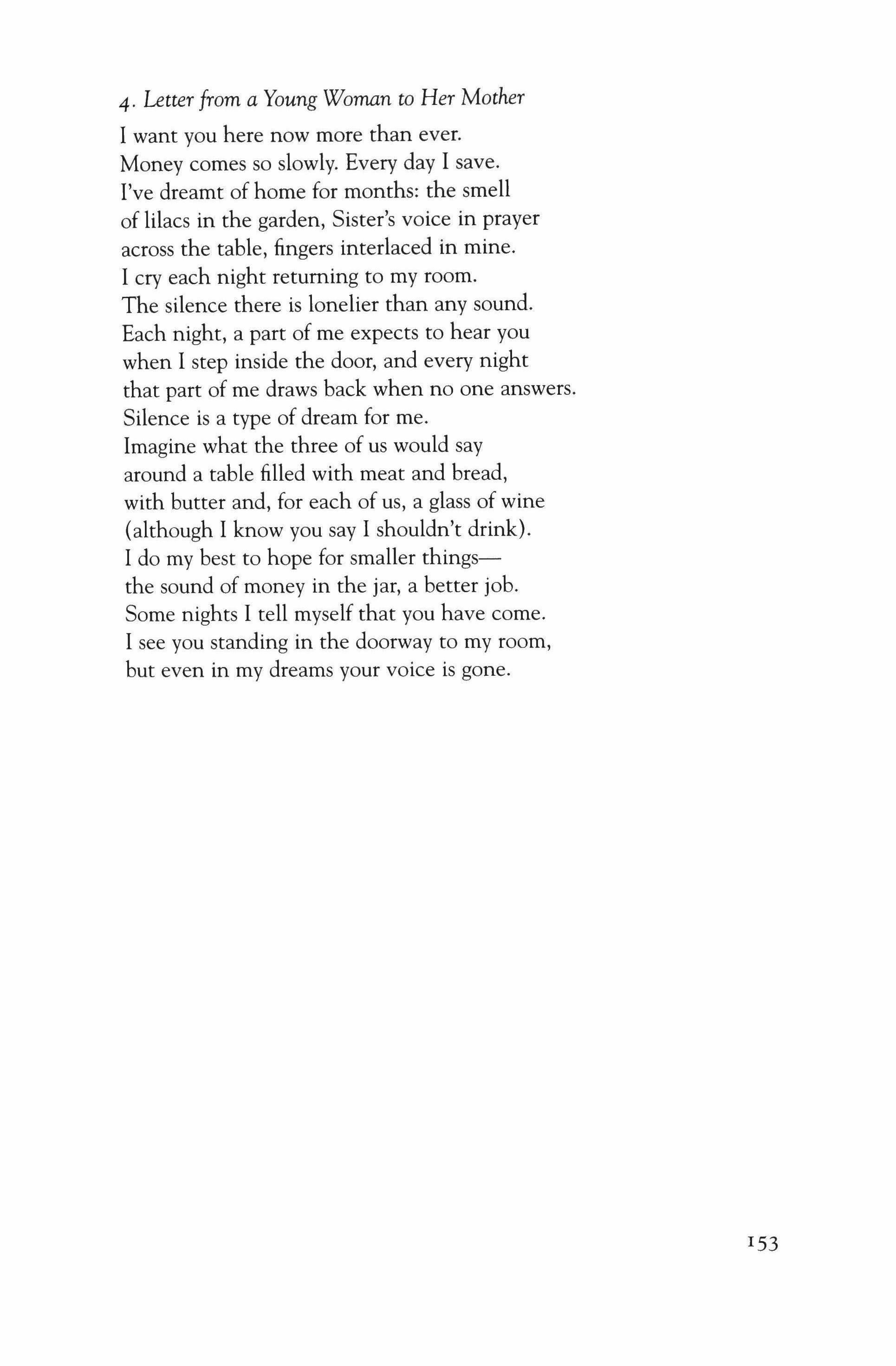
4. Letter from a Young Woman to Her Mother
I want you here now more than ever.
Money comes so slowly. Every day I save. I've dreamt of home for months: the smell of lilacs in the garden, Sister's voice in prayer across the table, fingers interlaced in mine. I cry each night returning to my room. The silence there is lonelier than any sound. Each night, a part of me expects to hear you when I step inside the door, and every night that part of me draws back when no one answers. Silence is a type of dream for me.
Imagine what the three of us would say around a table filled with meat and bread, with butter and, for each of us, a glass of wine (although I know you say I shouldn't drink). I do my best to hope for smaller thingsthe sound of money in the jar, a better job. Some nights I tell myself that you have come. I see you standing in the doorway to my room, but even in my dreams your voice is gone.
153
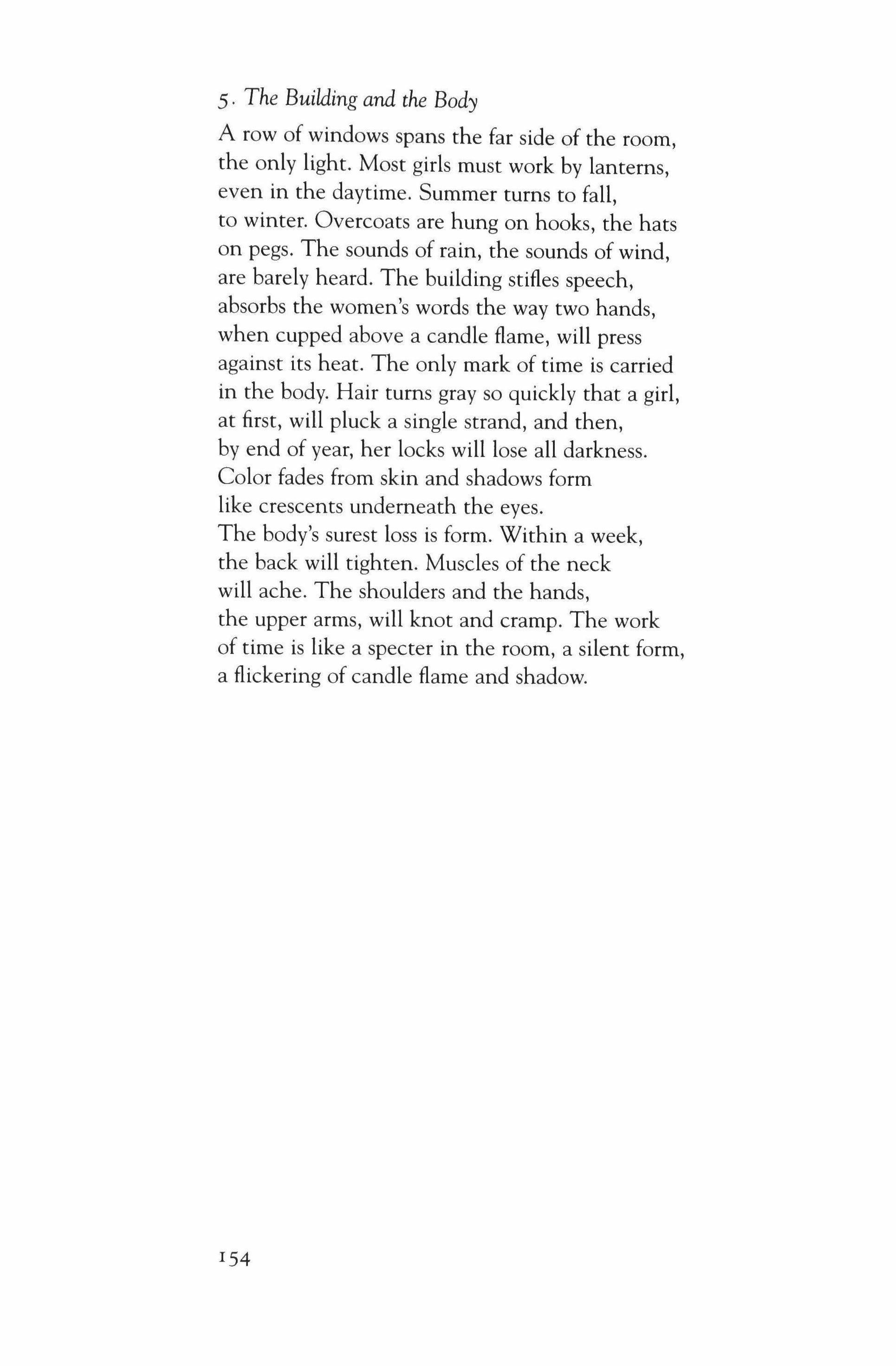
5. The Building and the Body
A row of windows spans the far side of the room, the only light. Most girls must work by lanterns, even in the daytime. Summer turns to fall, to winter. Overcoats are hung on hooks, the hats on pegs. The sounds of rain, the sounds of wind, are barely heard. The building stifles speech, absorbs the women's words the way two hands, when cupped above a candle flame, will press against its heat. The only mark of time is carried in the body. Hair turns gray so quickly that a girl, at first, will pluck a single strand, and then, by end of year, her locks will lose all darkness. Color fades from skin and shadows form like crescents underneath the eyes. The body's surest loss is form. Within a week, the back will tighten. Muscles of the neck will ache. The shoulders and the hands, the upper arms, will knot and cramp. The work of time is like a specter in the room, a silent form, a flickering of candle flame and shadow.
154
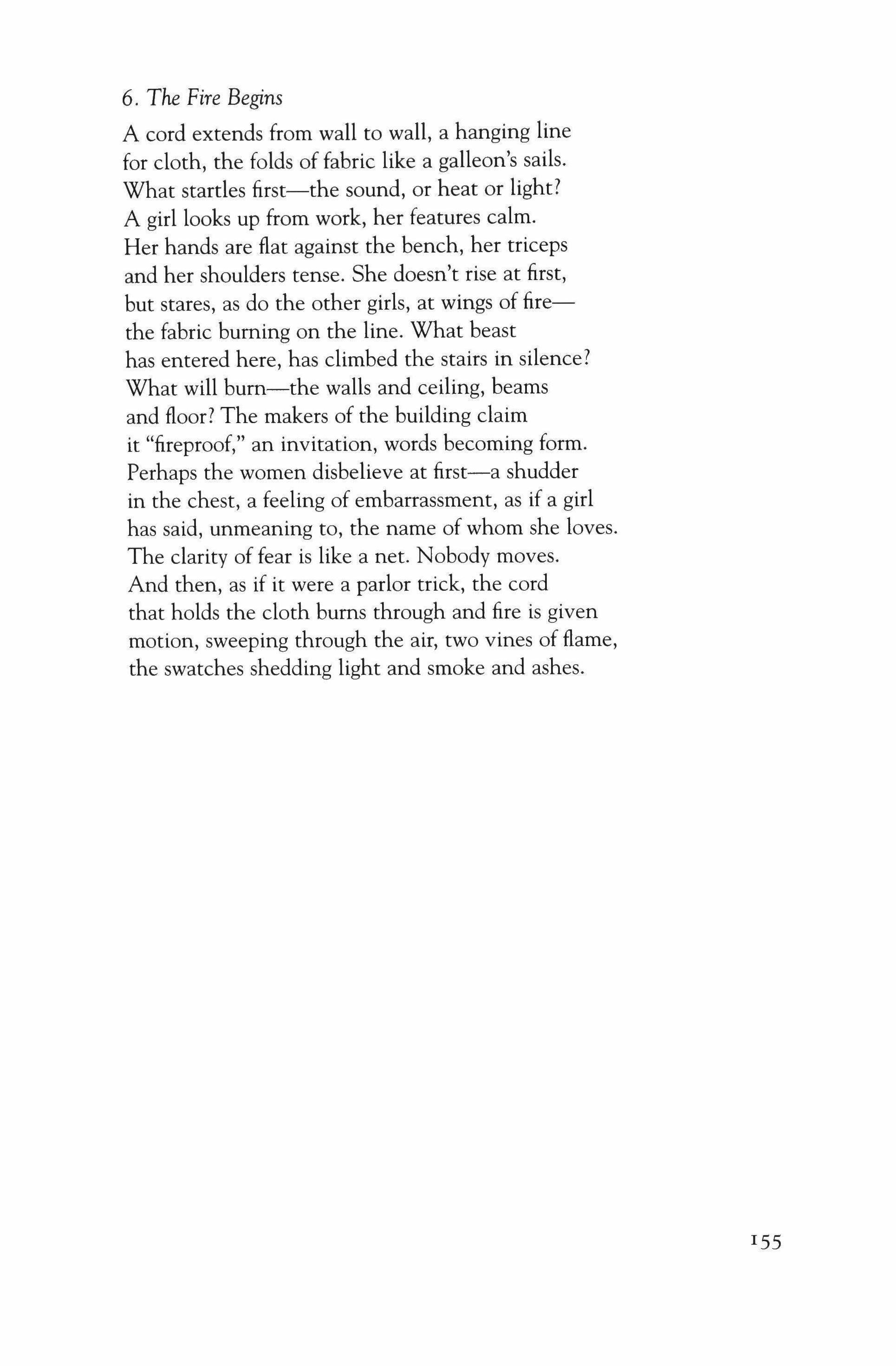
6. The Fire Begins
A cord extends from wall to wall, a hanging line for cloth, the folds of fabric like a galleon's sails. What startles first-the sound, or heat or light? A girl looks up from work, her features calm. Her hands are flat against the bench, her triceps and her shoulders tense. She doesn't rise at first, but stares, as do the other girls, at wings of firethe fabric burning on the line. What beast has entered here, has climbed the stairs in silence? What will bum-the walls and ceiling, beams and floor? The makers of the building claim it "fireproof," an invitation, words becoming form. Perhaps the women disbelieve at first-a shudder in the chest, a feeling of embarrassment, as if a girl has said, unmeaning to, the name of whom she loves. The clarity of fear is like a net. Nobody moves. And then, as if it were a parlor trick, the cord that holds the cloth bums through and fire is given motion, sweeping through the air, two vines of flame, the swatches shedding light and smoke and ashes.
155
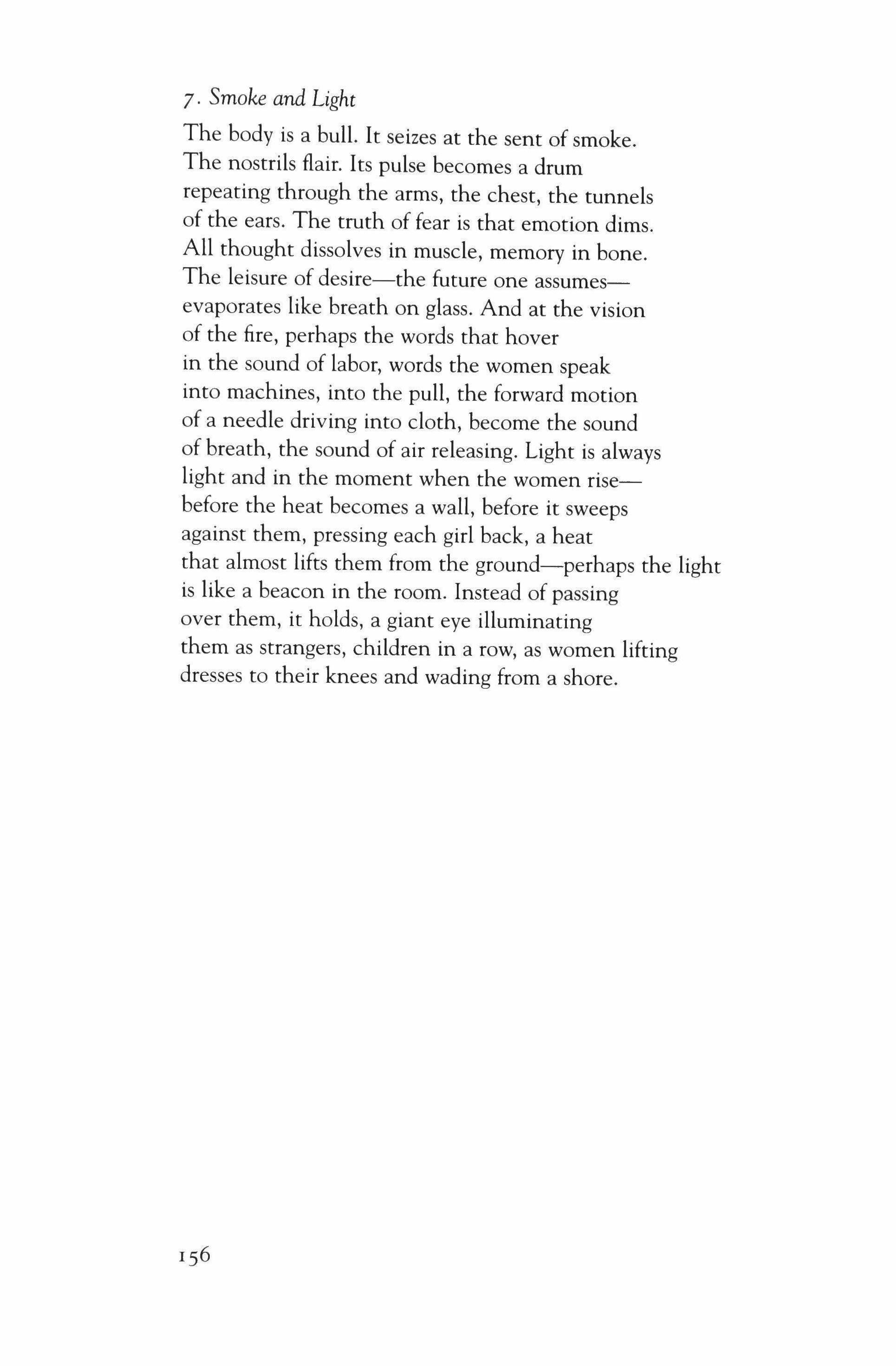
7. Smoke and Light
The body is a bull. It seizes at the sent of smoke. The nostrils flair. Its pulse becomes a drum repeating through the arms, the chest, the tunnels of the ears. The truth of fear is that emotion dims. All thought dissolves in muscle, memory in bone. The leisure of desire-the future one assumesevaporates like breath on glass. And at the vision of the fire, perhaps the words that hover in the sound of labor, words the women speak into machines, into the pull, the forward motion of a needle driving into cloth, become the sound of breath, the sound of air releasing. Light is always light and in the moment when the women risebefore the heat becomes a wall, before it sweeps against them, pressing each girl back, a heat that almost lifts them from the ground-perhaps the light is like a beacon in the room. Instead of passing over them, it holds, a giant eye illuminating them as strangers, children in a row, as women lifting dresses to their knees and wading from a shore.
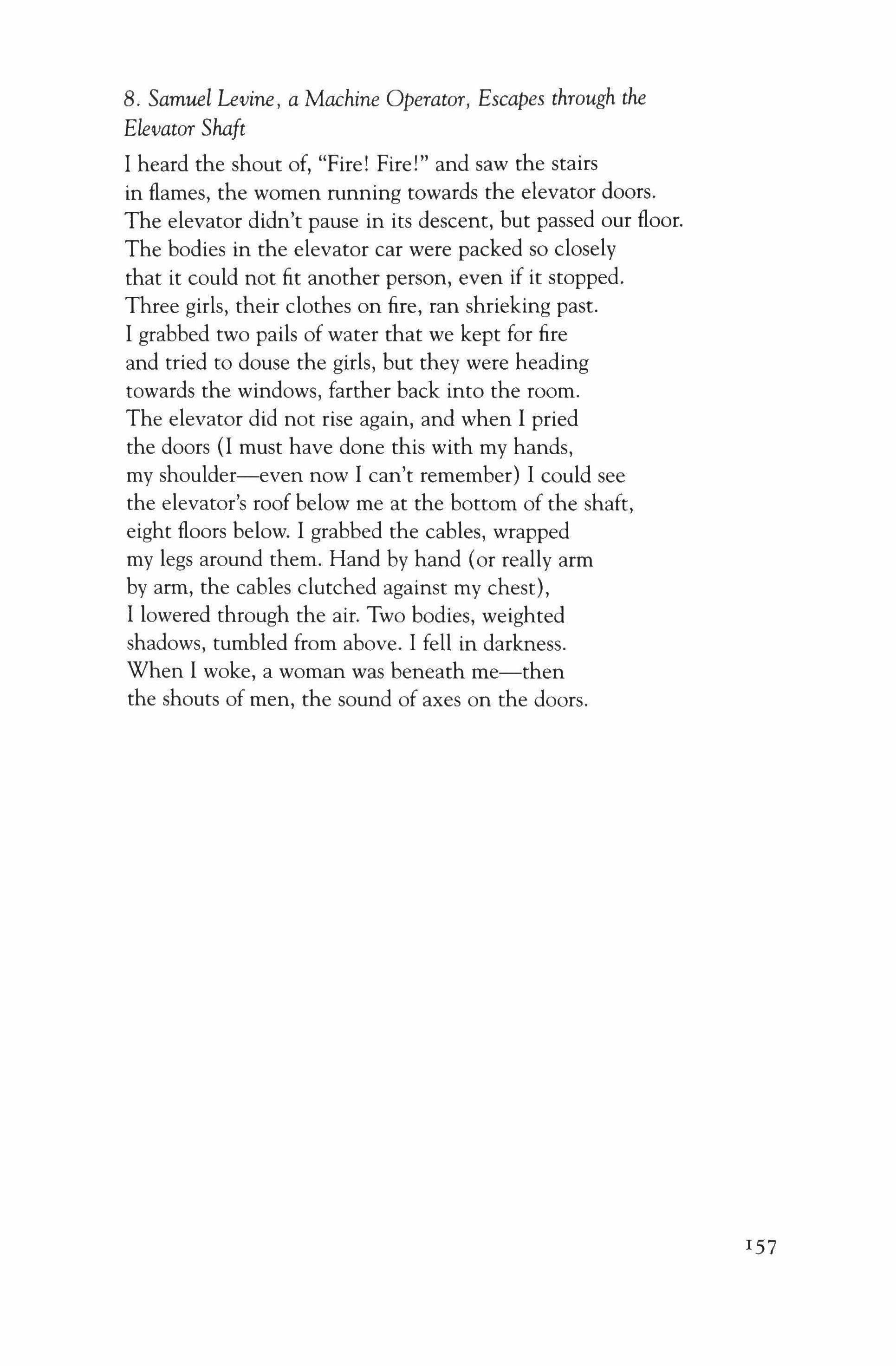
8. Samuel Levine, a Machine Operator, Escapes through the Elevator Shaft
I heard the shout of, "Fire! Fire!" and saw the stairs in flames, the women running towards the elevator doors. The elevator didn't pause in its descent, but passed our floor. The bodies in the elevator car were packed so closely that it could not fit another person, even if it stopped. Three girls, their clothes on fire, ran shrieking past. I grabbed two pails of water that we kept for fire and tried to douse the girls, but they were heading towards the windows, farther back into the room. The elevator did not rise again, and when I pried the doors (I must have done this with my hands, my shoulder-even now I can't remember) I could see the elevator's roof below me at the bottom of the shaft, eight floors below. I grabbed the cables, wrapped my legs around them. Hand by hand (or really arm by arm, the cables clutched against my chest), I lowered through the air. Two bodies, weighted shadows, tumbled from above. I fell in darkness. When I woke, a woman was beneath me-then the shouts of men, the sound of axes on the doors.
157
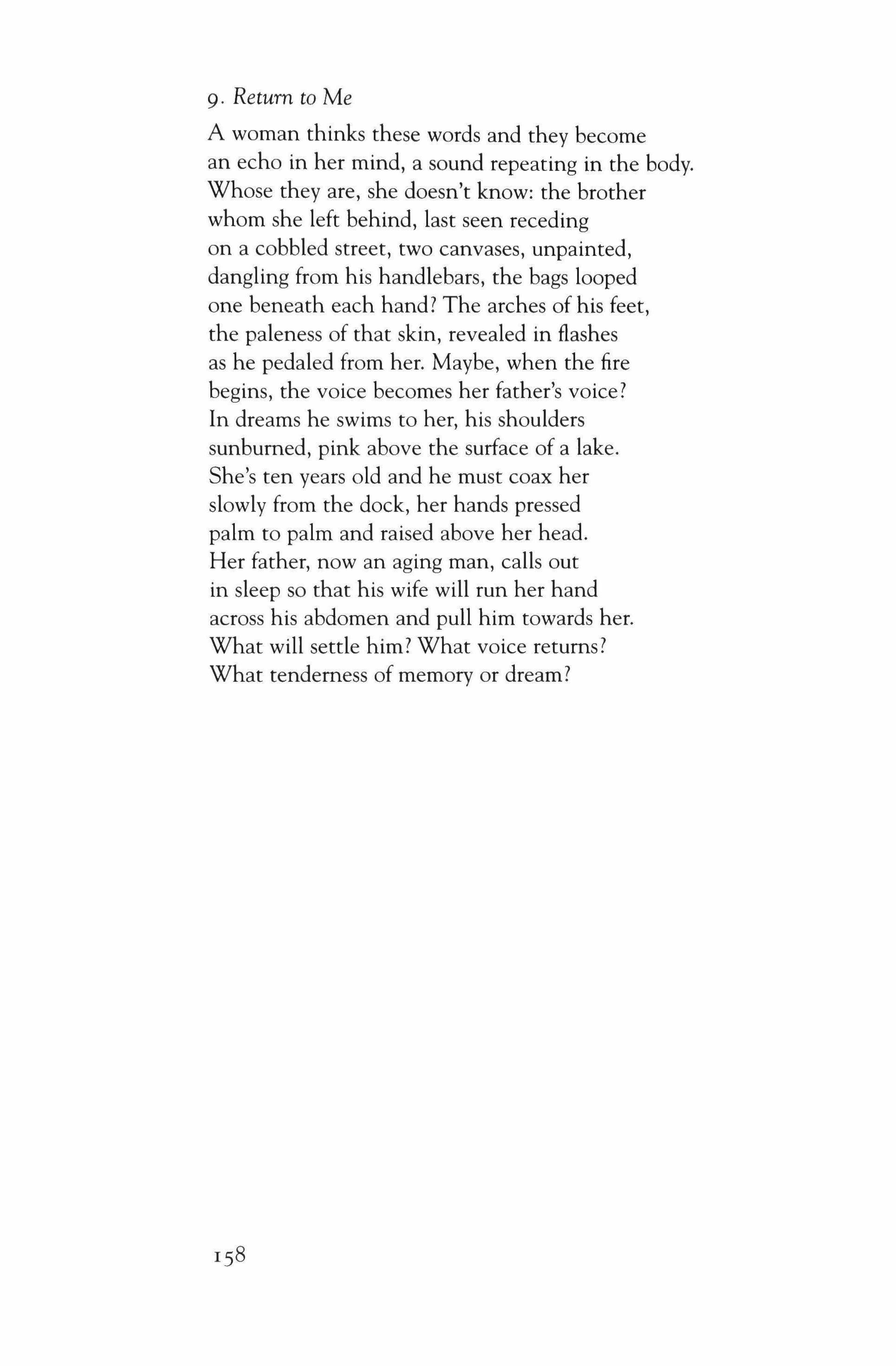
9· Return to Me
A woman thinks these words and they become an echo in her mind, a sound repeating in the body. Whose they are, she doesn't know: the brother whom she left behind, last seen receding on a cobbled street, two canvases, unpainted, dangling from his handlebars, the bags looped one beneath each hand? The arches of his feet, the paleness of that skin, revealed in flashes as he pedaled from her. Maybe, when the fire begins, the voice becomes her father's voice? In dreams he swims to her, his shoulders sunburned, pink above the surface of a lake. She's ten years old and he must coax her slowly from the dock, her hands pressed palm to palm and raised above her head. Her father, now an aging man, calls out in sleep so that his wife will run her hand across his abdomen and pull him towards her. What will settle him? What voice returns? What tenderness of memory or dream?
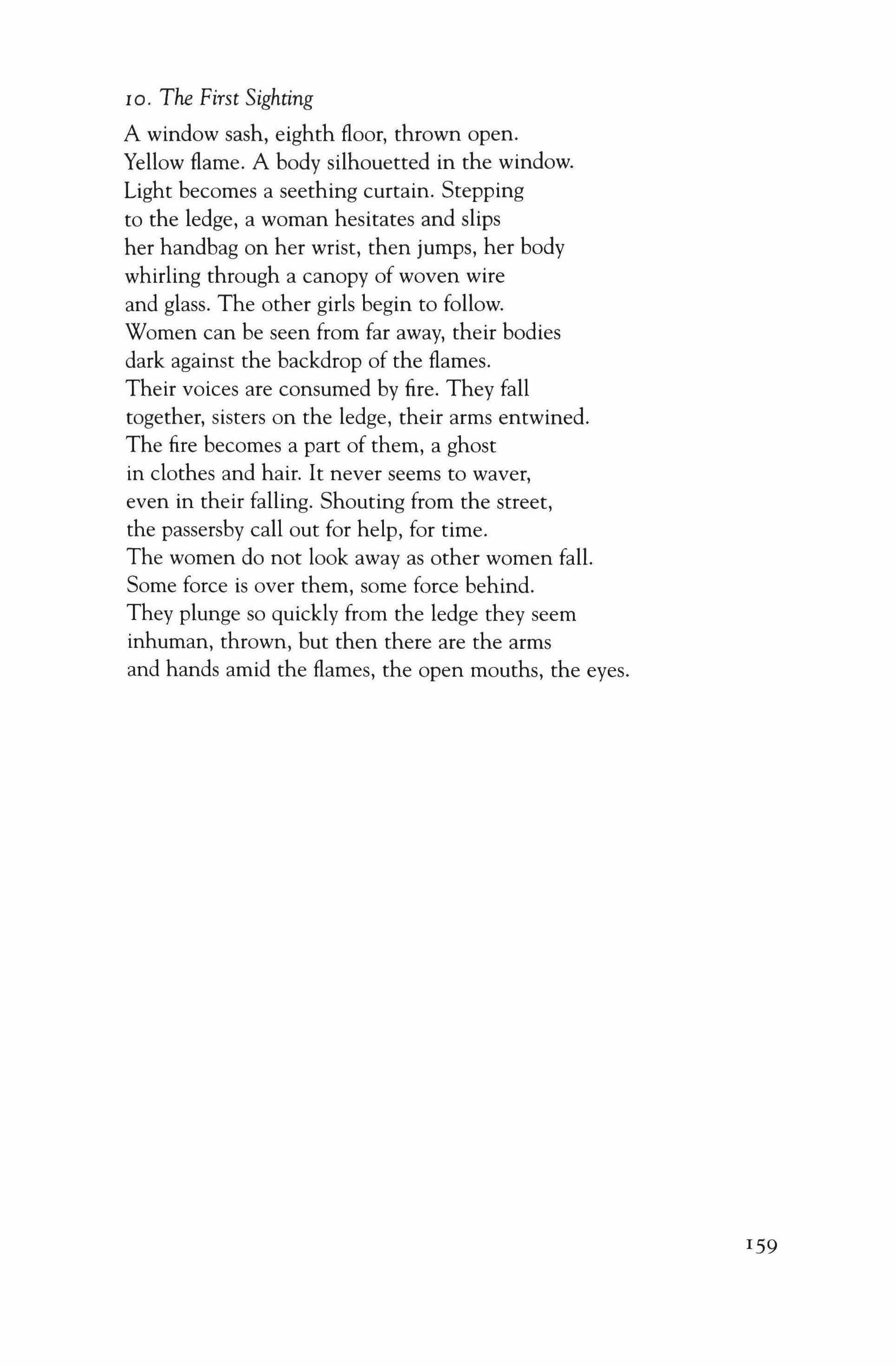
10. The First Sighting
A window sash, eighth floor, thrown open. Yellow flame. A body silhouetted in the window. Light becomes a seething curtain. Stepping to the ledge, a woman hesitates and slips her handbag on her wrist, then jumps, her body whirling through a canopy of woven wire and glass. The other girls begin to follow. Women can be seen from far away, their bodies dark against the backdrop of the flames. Their voices are consumed by fire. They fall together, sisters on the ledge, their arms entwined. The fire becomes a part of them, a ghost in clothes and hair. It never seems to waver, even in their falling. Shouting from the street, the passersby call out for help, for time. The women do not look away as other women fall. Some force is over them, some force behind. They plunge so quickly from the ledge they seem inhuman, thrown, but then there are the arms and hands amid the flames, the open mouths, the eyes.
159
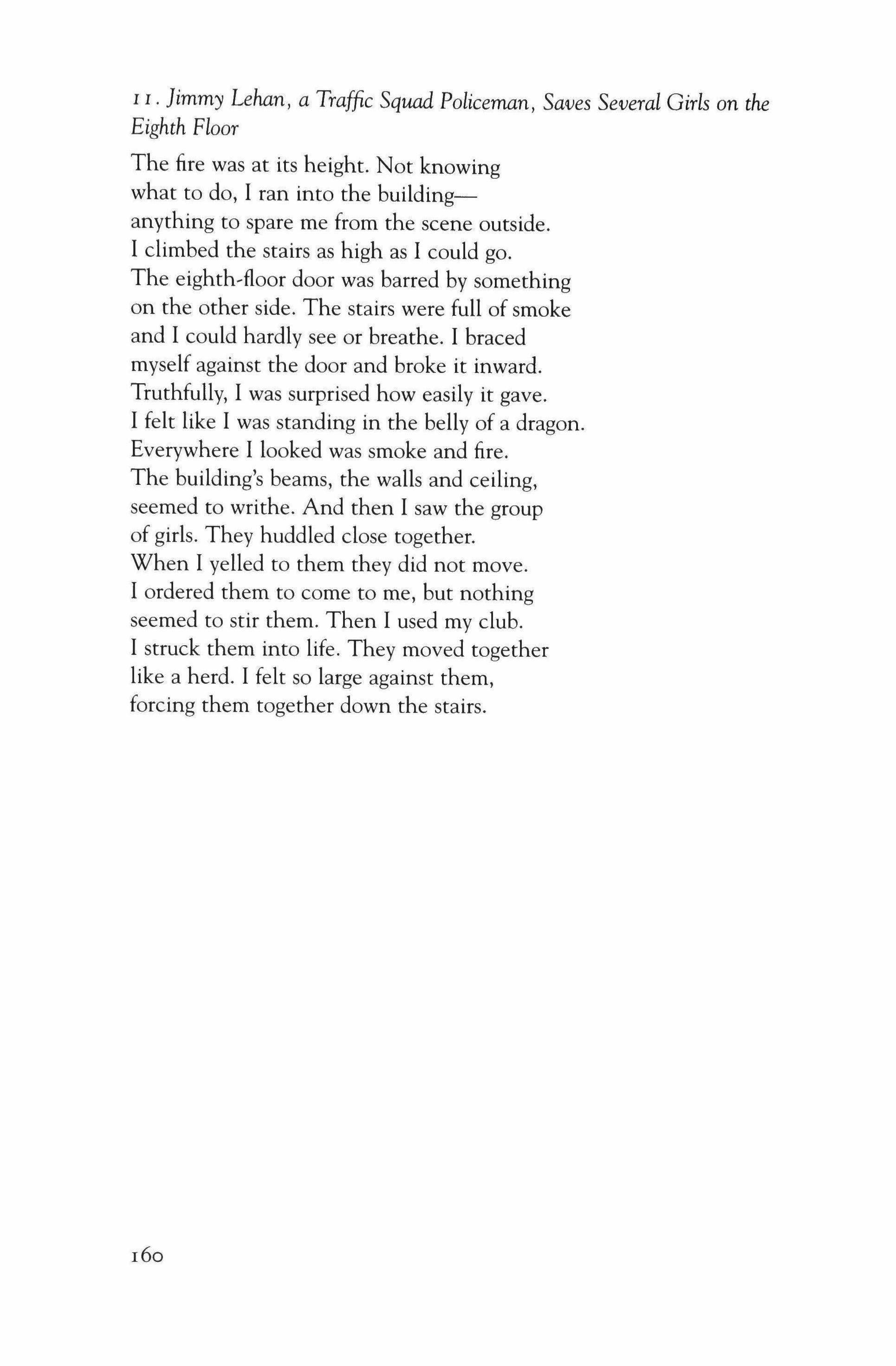
I I Jimmy Lehan, a Traffic Squad Policeman, Saves Several Girls on the Eighth Floor
The fire was at its height. Not knowing what to do, I ran into the buildinganything to spare me from the scene outside. I climbed the stairs as high as I could go. The eighth-floor door was barred by something on the other side. The stairs were full of smoke and I could hardly see or breathe. I braced myself against the door and broke it inward.
Truthfully, I was surprised how easily it gave. I felt like I was standing in the belly of a dragon. Everywhere I looked was smoke and fire. The building's beams, the walls and ceiling, seemed to writhe. And then I saw the group of girls. They huddled close together. When I yelled to them they did not move. I ordered them to come to me, but nothing seemed to stir them. Then I used my club. I struck them into life. They moved together like a herd. I felt so large against them, forcing them together down the stairs.
160
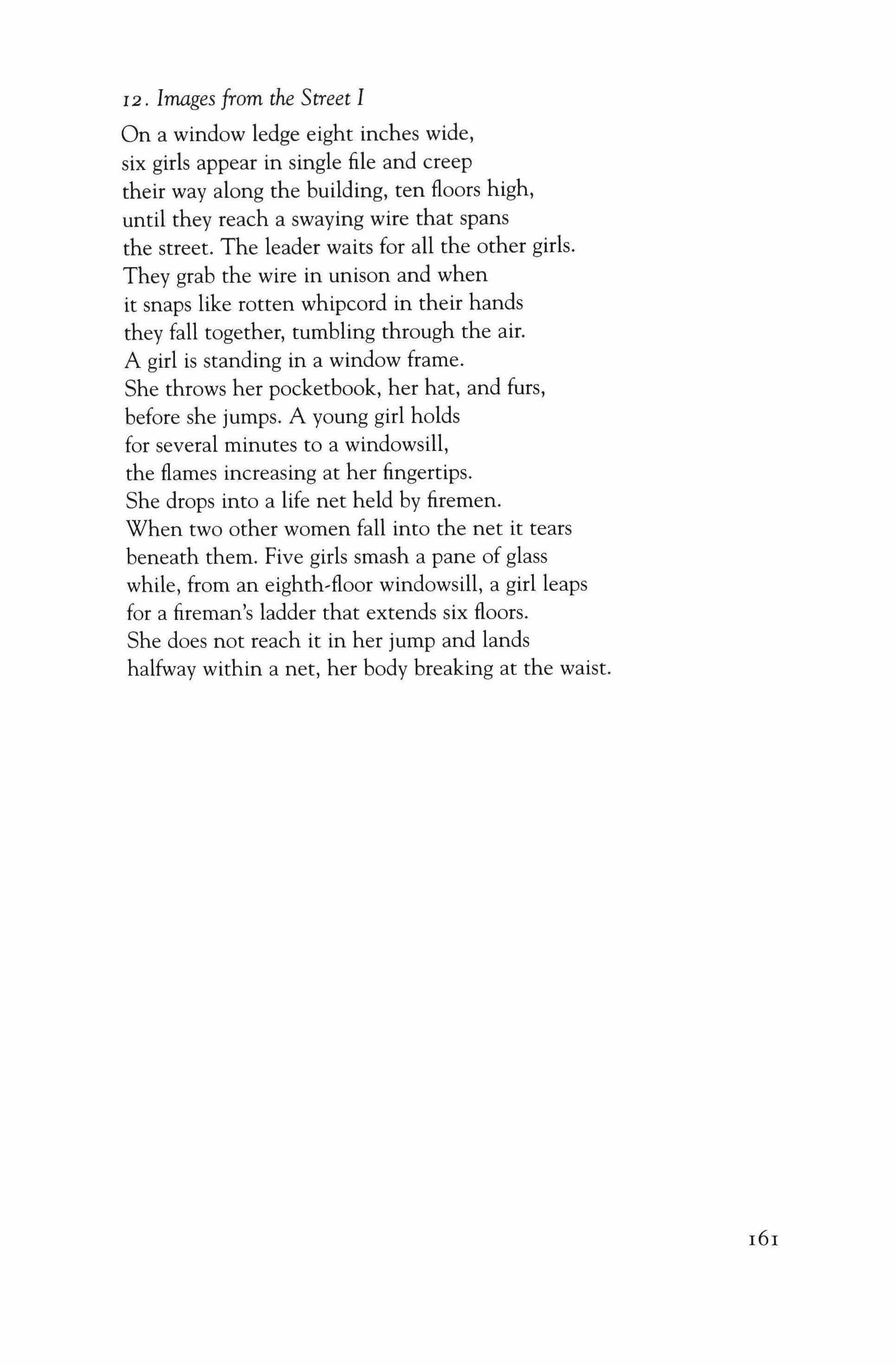
12. Images from the Street I
On a window ledge eight inches wide, six girls appear in single file and creep their way along the building, ten floors high, until they reach a swaying wire that spans the street. The leader waits for all the other girls. They grab the wire in unison and when it snaps like rotten whipcord in their hands they fall together, tumbling through the air. A girl is standing in a window frame. She throws her pocketbook, her hat, and furs, before she jumps. A young girl holds for several minutes to a windowsill, the flames increasing at her fingertips. She drops into a life net held by firemen. When two other women fall into the net it tears beneath them. Five girls smash a pane of glass while, from an eighth-floor windowsill, a girl leaps for a fireman's ladder that extends six floors. She does not reach it in her jump and lands halfway within a net, her body breaking at the waist.
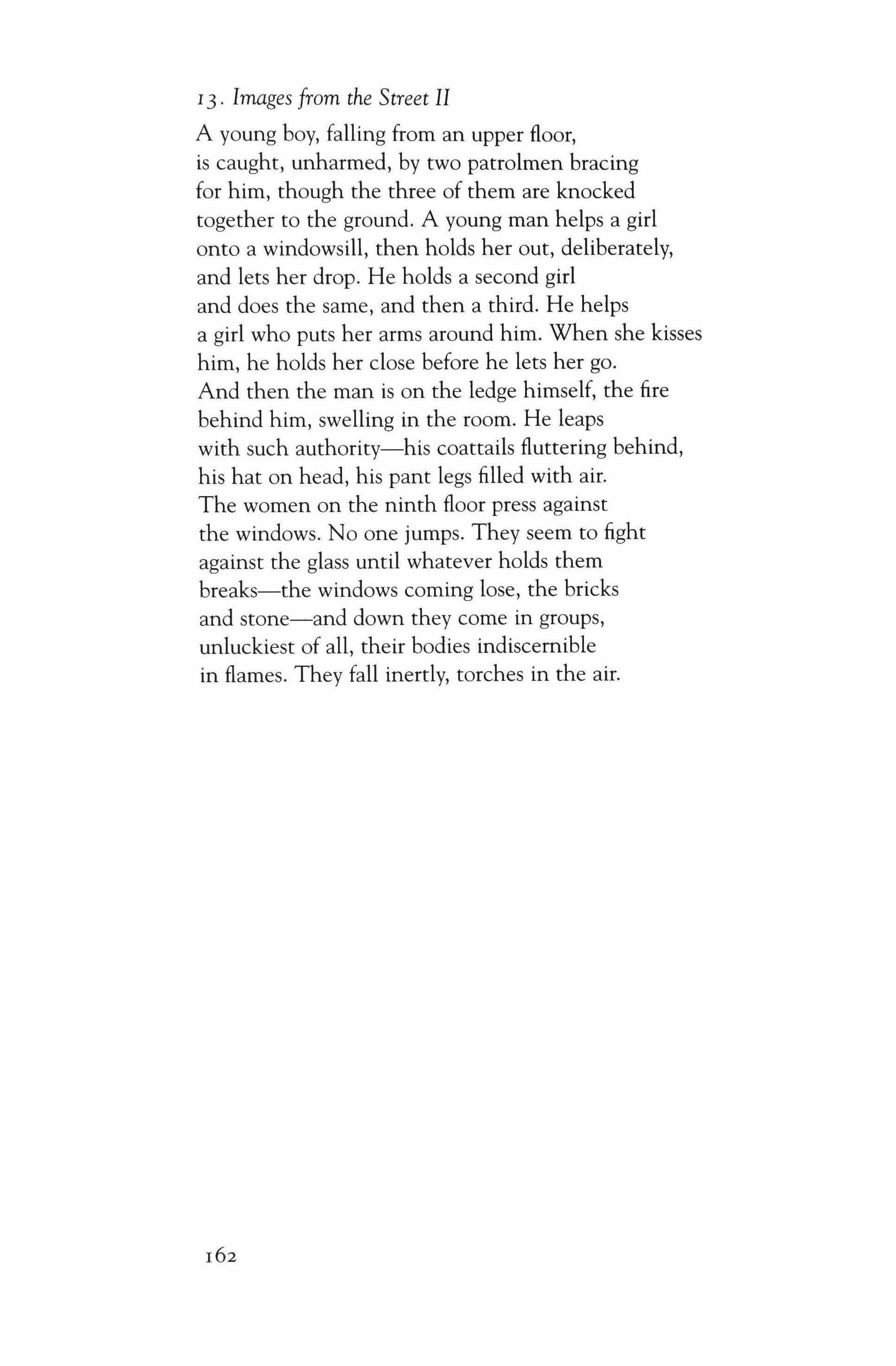
13. Images from the Street II
A young boy, falling from an upper floor, is caught, unharmed, by two patrolmen bracing for him, though the three of them are knocked together to the ground. A young man helps a girl onto a windowsill, then holds her out, deliberately, and lets her drop. He holds a second girl and does the same, and then a third. He helps a girl who puts her arms around him. When she kisses him, he holds her close before he lets her go. And then the man is on the ledge himself, the fire behind him, swelling in the room. He leaps with such authority-his coattails fluttering behind, his hat on head, his pant legs filled with air.
The women on the ninth floor press against the windows. No one jumps. They seem to fight against the glass until whatever holds them breaks-the windows coming lose, the bricks and stone-and down they come in groups, unluckiest of all, their bodies indiscernible in flames. They fall inertly, torches in the air.
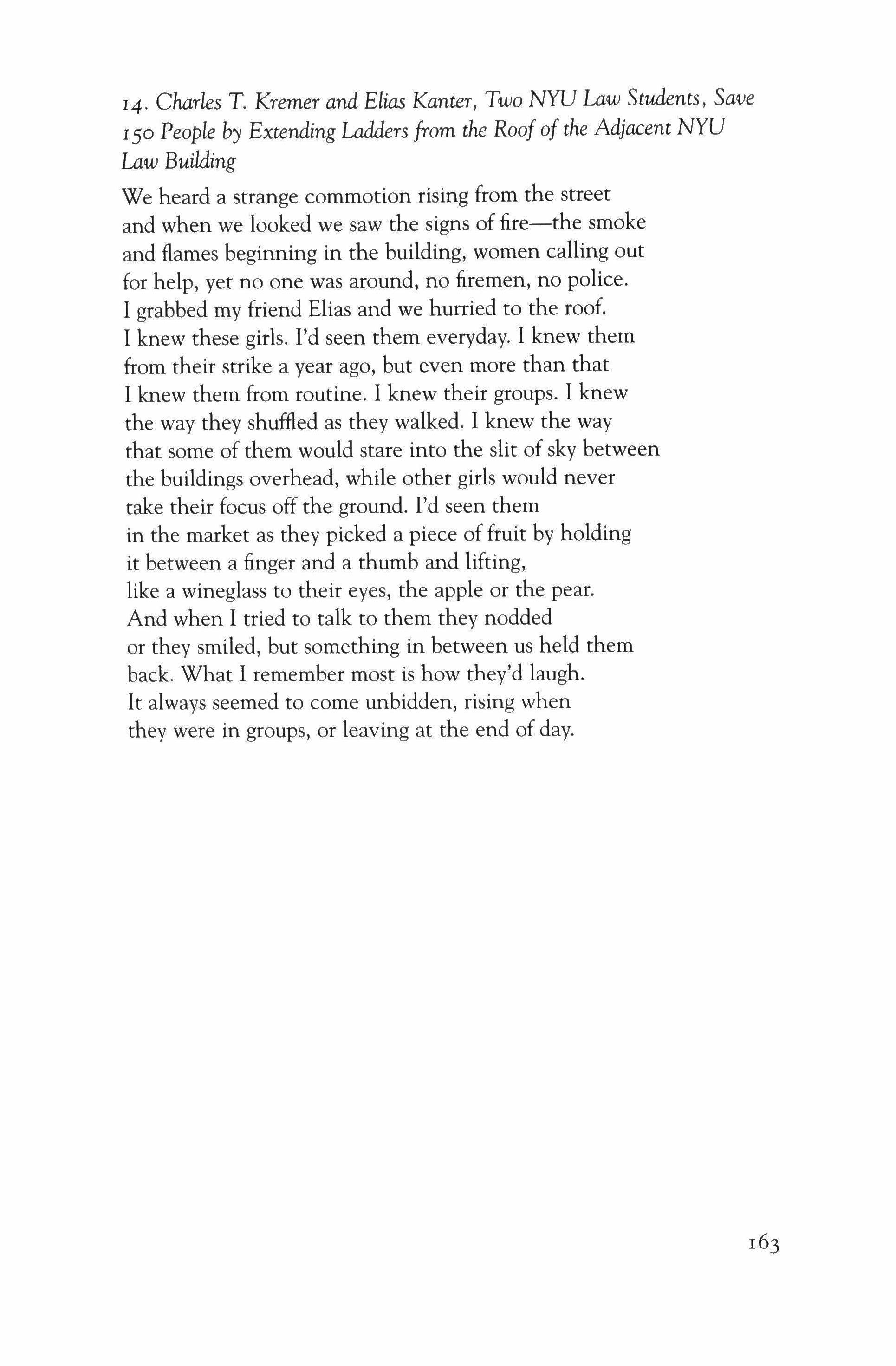
14. Charles T. Kremer and Elias Kanter, Two NYU Law Students, Save ISO People by Extending Ladders from the Roofof the Adjacent NYU Law Building
We heard a strange commotion rising from the street and when we looked we saw the signs of fire-the smoke and flames beginning in the building, women calling out for help, yet no one was around, no firemen, no police. I grabbed my friend Elias and we hurried to the roof. I knew these girls. I'd seen them everyday. I knew them from their strike a year ago, but even more than that I knew them from routine. I knew their groups. I knew the way they shuffled as they walked. I knew the way that some of them would stare into the slit of sky between the buildings overhead, while other girls would never take their focus off the ground. I'd seen them in the market as they picked a piece of fruit by holding it between a finger and a thumb and lifting, like a wineglass to their eyes, the apple or the pear. And when I tried to talk to them they nodded or they smiled, but something in between us held them back. What I remember most is how they'd laugh. It always seemed to come unbidden, rising when they were in groups, or leaving at the end of day.
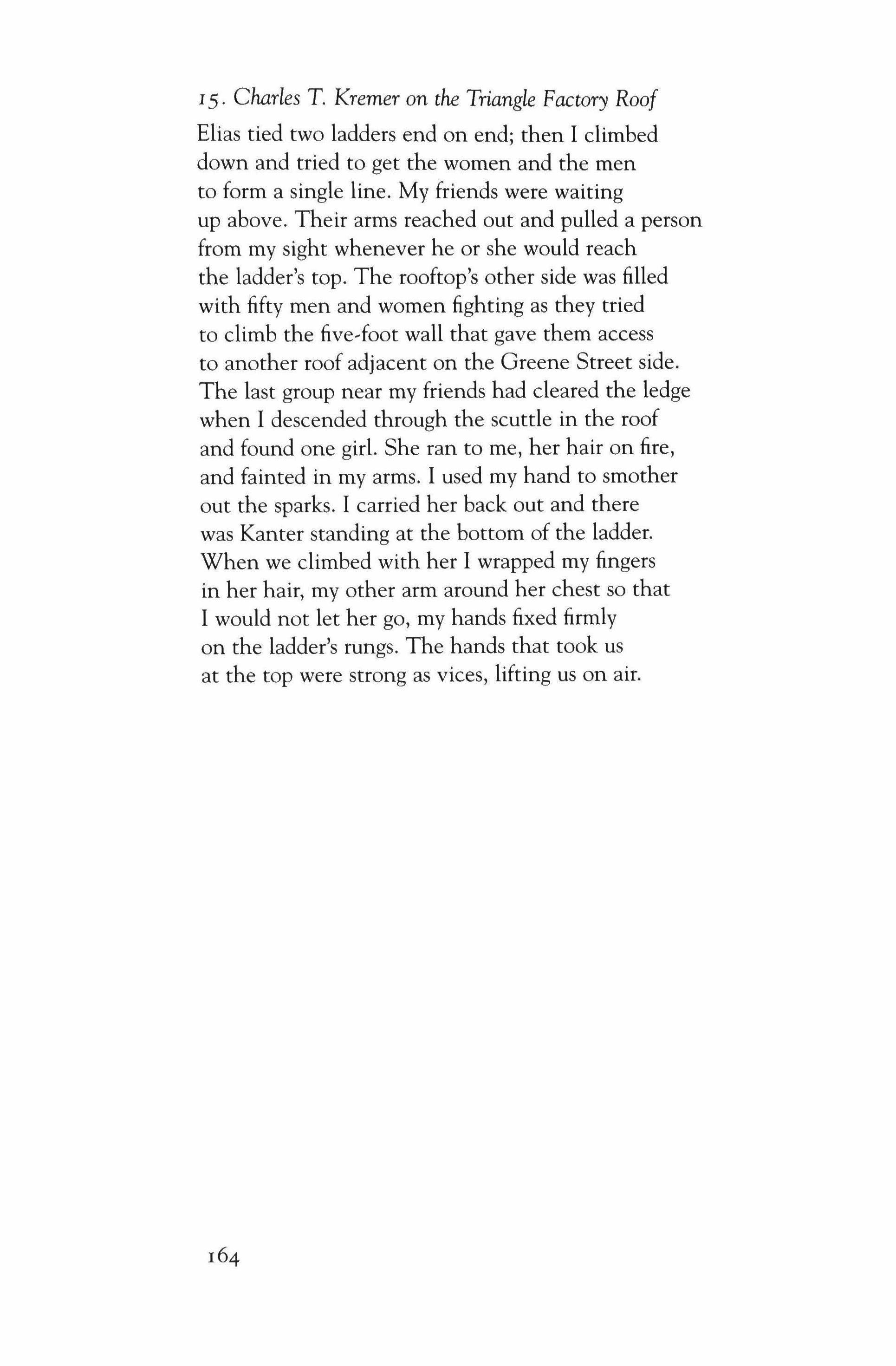
15· Charles T. Kremer on the Triangle Factory Roof Elias tied two ladders end on end; then I climbed down and tried to get the women and the men to form a single line. My friends were waiting up above. Their arms reached out and pulled a person from my sight whenever he or she would reach the ladder's top. The rooftop's other side was filled with fifty men and women fighting as they tried to climb the five-foot wall that gave them access to another roof adjacent on the Greene Street side. The last group near my friends had cleared the ledge when I descended through the scuttle in the roof and found one girl. She ran to me, her hair on fire, and fainted in my arms. I used my hand to smother out the sparks. I carried her back out and there was Kanter standing at the bottom of the ladder. When we climbed with her I wrapped my fingers in her hair, my other arm around her chest so that I would not let her go, my hands fixed firmly on the ladder's rungs. The hands that took us at the top were strong as vices, lifting us on air.
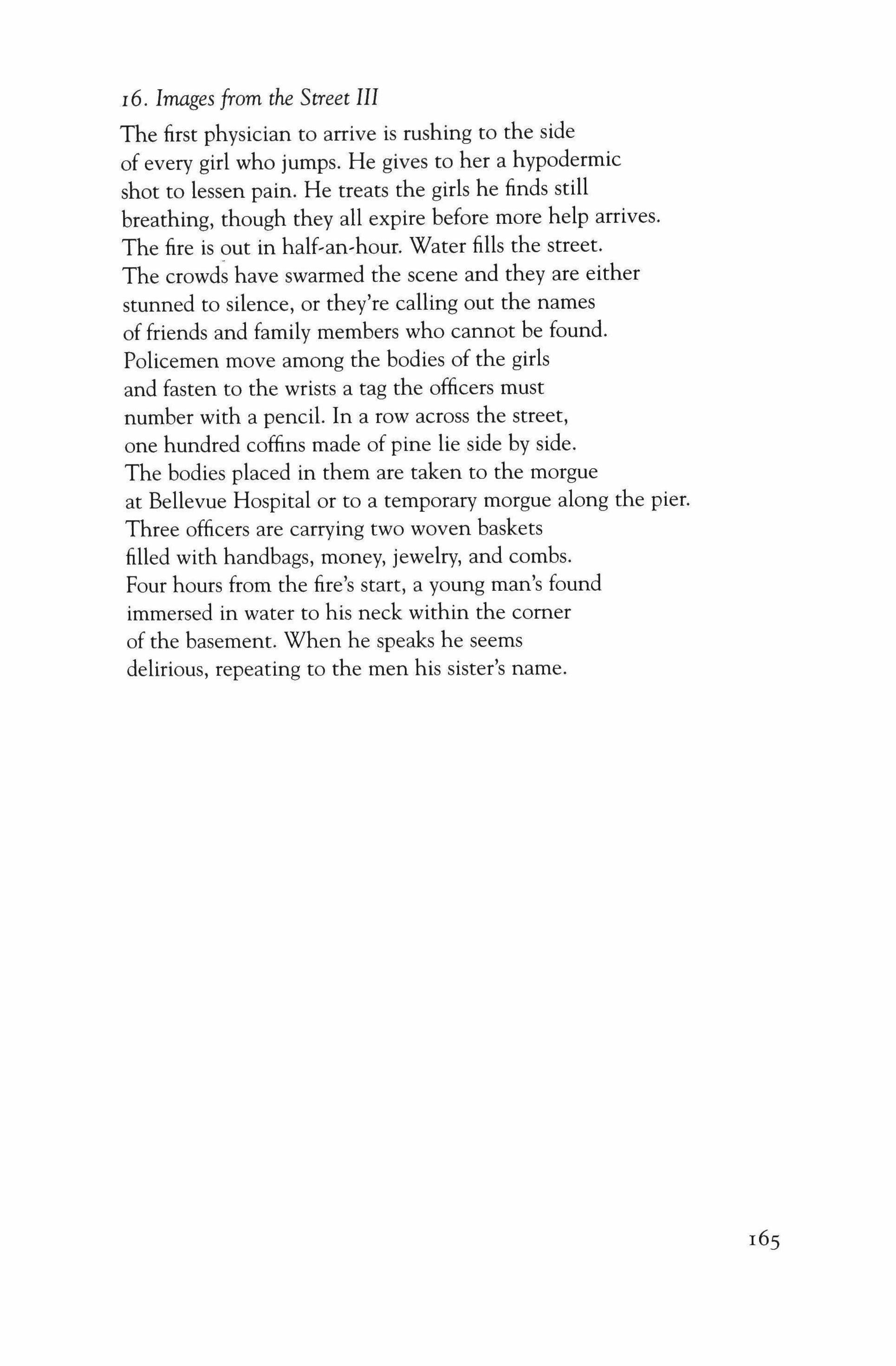
r6. Images from the Street III
The first physician to arrive is rushing to the side of every girl who jumps. He gives to her a hypodermic shot to lessen pain. He treats the girls he finds still breathing, though they all expire before more help arrives. The fire is out in half-an-hour, Water fills the street. The crowds have swarmed the scene and they are either stunned to silence, or they're calling out the names of friends and family members who cannot be found. Policemen move among the bodies of the girls and fasten to the wrists a tag the officers must number with a pencil. In a row across the street, one hundred coffins made of pine lie side by side. The bodies placed in them are taken to the morgue at Bellevue Hospital or to a temporary morgue along the pier. Three officers are carrying two woven baskets filled with handbags, money, jewelry, and combs. Four hours from the fire's start, a young man's found immersed in water to his neck within the comer of the basement. When he speaks he seems delirious, repeating to the men his sister's name.
165
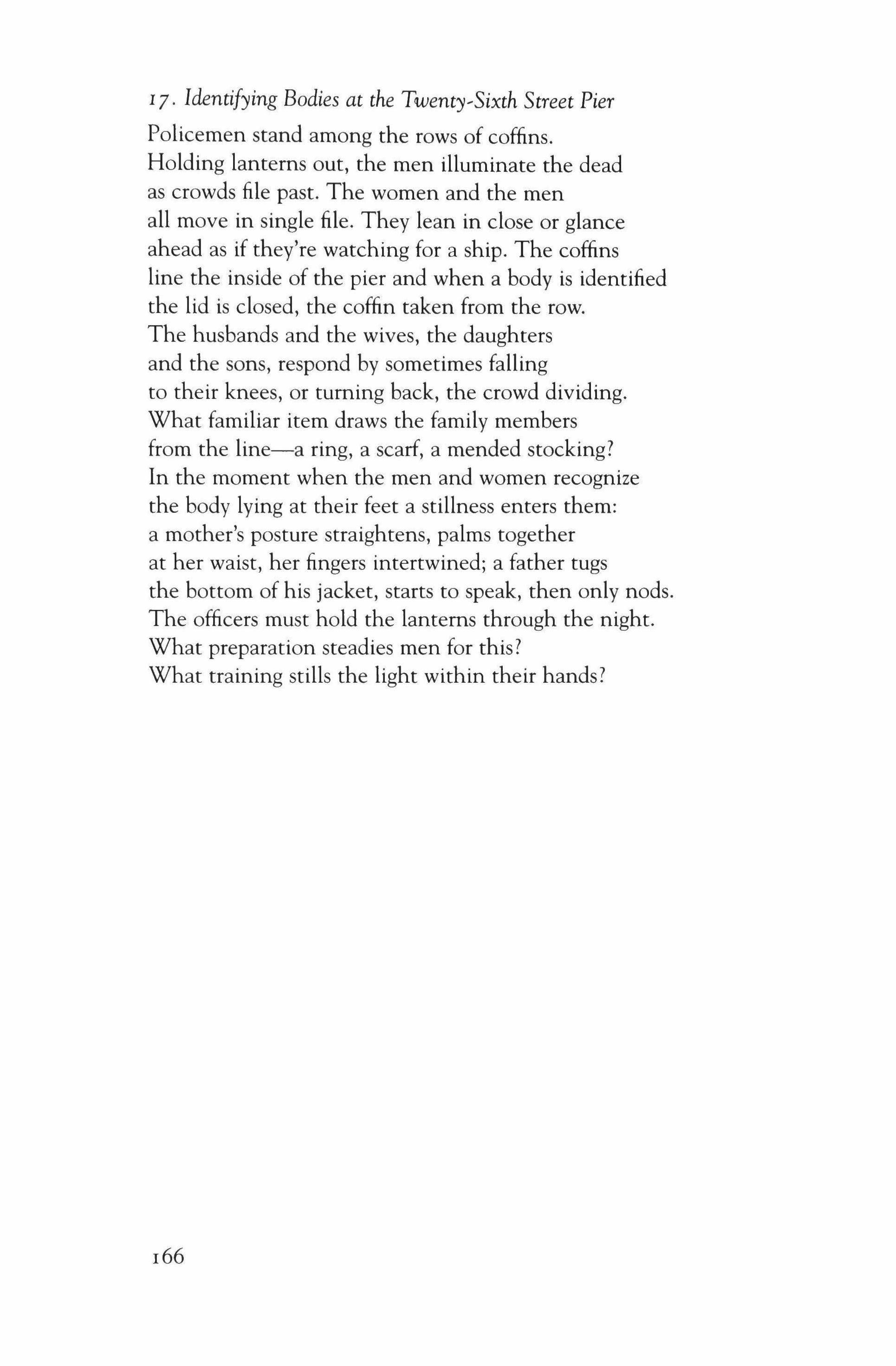
17· Identifying Bodies at the Twenty�Sixth Street Pier Policemen stand among the rows of coffins. Holding lanterns out, the men illuminate the dead as crowds file past. The women and the men all move in single file. They lean in close or glance ahead as if they're watching for a ship. The coffins line the inside of the pier and when a body is identified the lid is closed, the coffin taken from the row. The husbands and the wives, the daughters and the sons, respond by sometimes falling to their knees, or turning back, the crowd dividing. What familiar item draws the family members from the line-a ring, a scarf, a mended stocking? In the moment when the men and women recognize the body lying at their feet a stillness enters them: a mother's posture straightens, palms together at her waist, her fingers intertwined; a father tugs the bottom of his jacket, starts to speak, then only nods. The officers must hold the lanterns through the night. What preparation steadies men for this? What training stills the light within their hands?
166
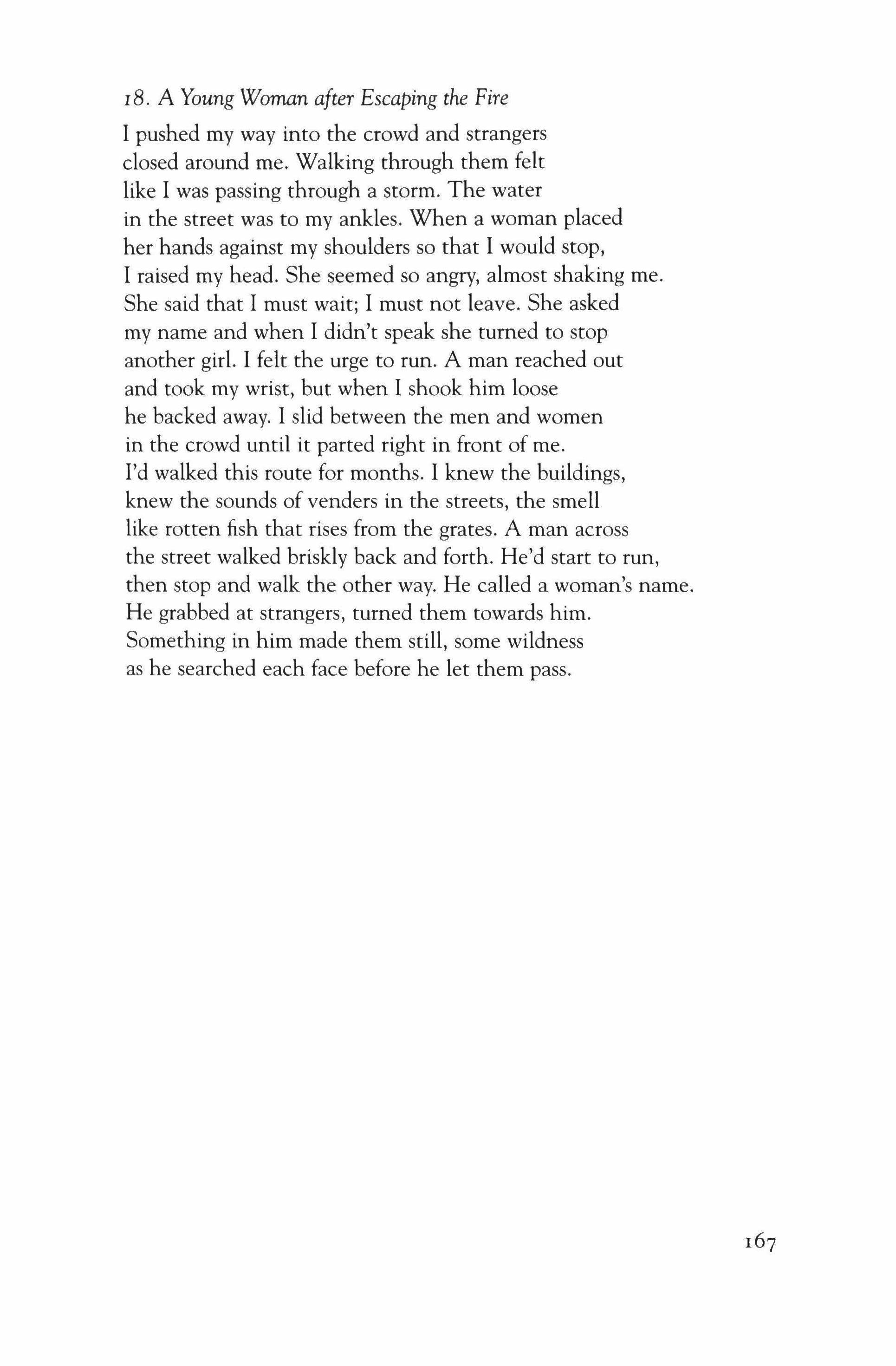
18. A Young Woman after Escaping the Fire
I pushed my way into the crowd and strangers closed around me. Walking through them felt like I was passing through a storm. The water in the street was to my ankles. When a woman placed her hands against my shoulders so that I would stop, I raised my head. She seemed so angry, almost shaking me. She said that I must wait; I must not leave. She asked my name and when I didn't speak she turned to stop another girl. I felt the urge to run. A man reached out and took my wrist, but when I shook him loose he backed away. I slid between the men and women in the crowd until it parted right in front of me. I'd walked this route for months. I knew the buildings, knew the sounds of venders in the streets, the smell like rotten fish that rises from the grates. A man across the street walked briskly back and forth. He'd start to run, then stop and walk the other way. He called a woman's name. He grabbed at strangers, turned them towards him. Something in him made them still, some wildness as he searched each face before he let them pass.
GregJohnson
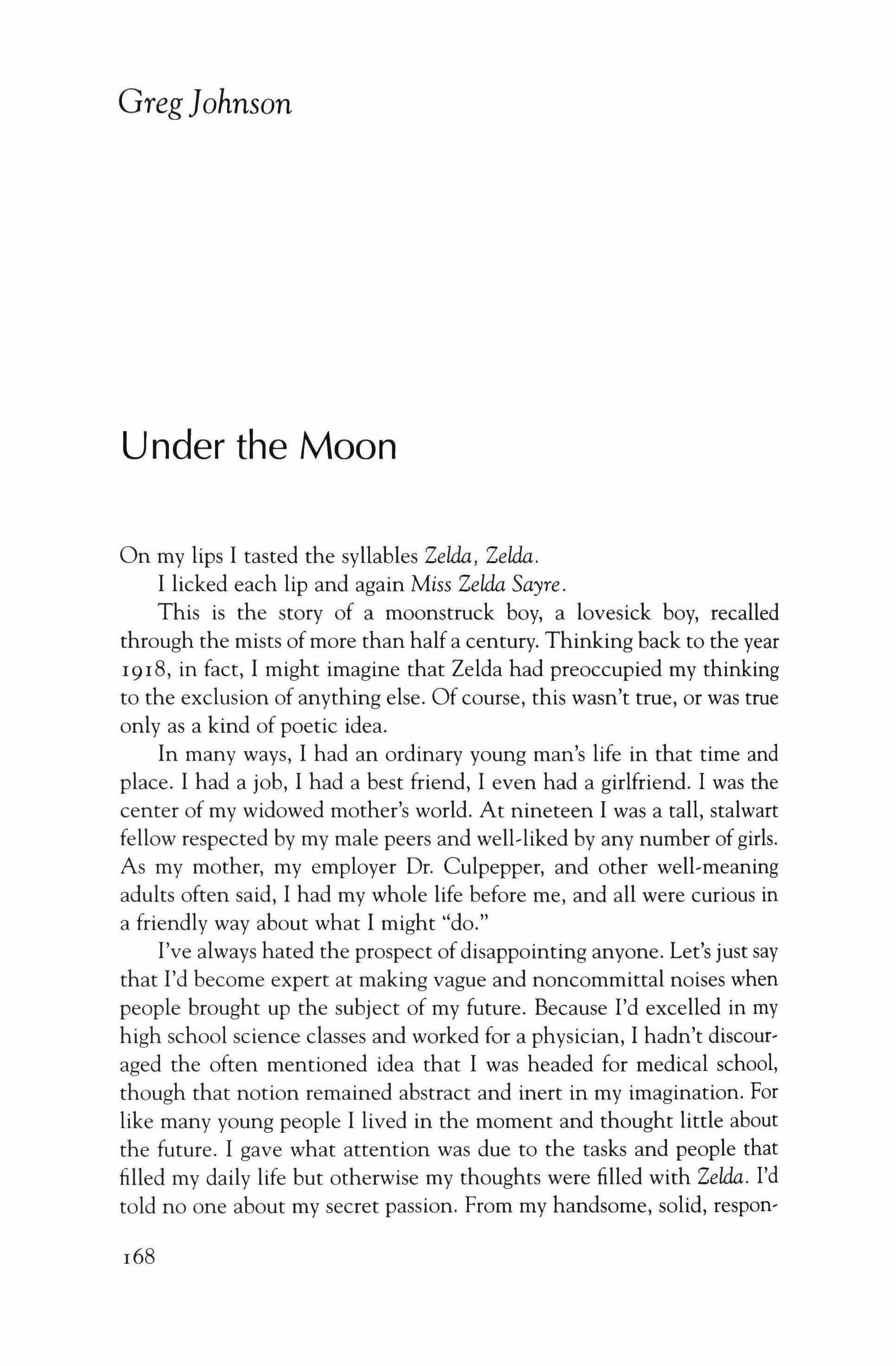
Under the Moon
On my lips I tasted the syllables Zelda, Zelda. I licked each lip and again Miss Zelda Sayre.
This is the story of a moonstruck boy, a lovesick boy, recalled through the mists of more than half a century. Thinking back to the year 1918, in fact, I might imagine that Zelda had preoccupied my thinking to the exclusion of anything else. Of course, this wasn't true, or was true only as a kind of poetic idea.
In many ways, I had an ordinary young man's life in that time and place. I had a job, I had a best friend, I even had a girlfriend. I was the center of my widowed mother's world. At nineteen I was a tall, stalwart fellow respected by my male peers and well-liked by any number of girls. As my mother, my employer Dr. Culpepper, and other well-meaning adults often said, I had my whole life before me, and all were curious in a friendly way about what I might "do."
I've always hated the prospect ofdisappointing anyone. Let's just say that I'd become expert at making vague and noncommittal noises when people brought up the subject of my future. Because I'd excelled in my high school science classes and worked for a physician, I hadn't discouraged the often mentioned idea that I was headed for medical school, though that notion remained abstract and inert in my imagination. For like many young people I lived in the moment and thought little about the future. I gave what attention was due to the tasks and people that filled my daily life but otherwise my thoughts were filled with Zelda. I'd told no one about my secret passion. From my handsome, solid, respon-
168
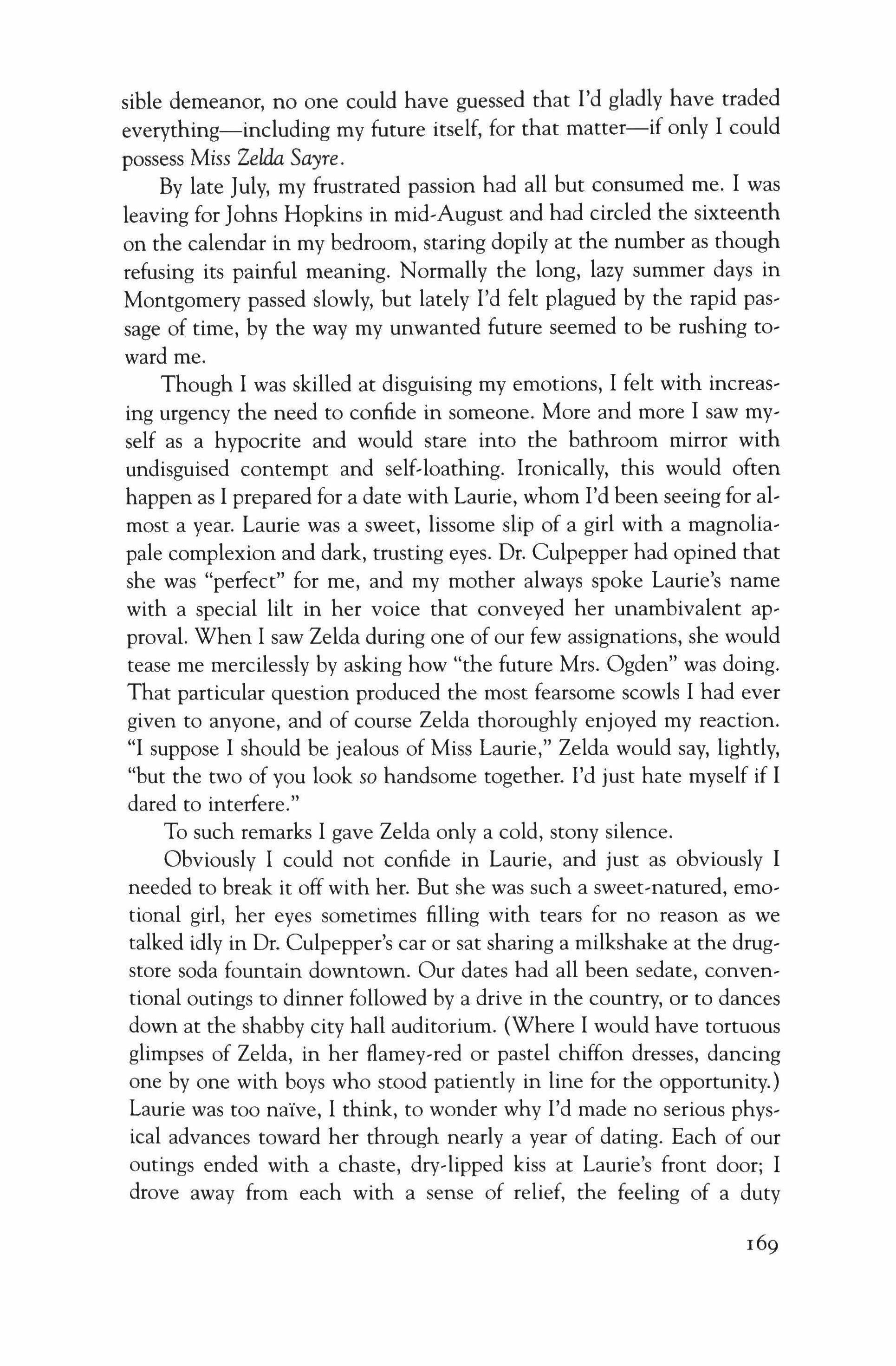
sible demeanor, no one could have guessed that I'd gladly have traded everything-including my future itself, for that matter-if only I could possess Miss Zelda Sayre.
By late July, my frustrated passion had all but consumed me. I was leaving for Johns Hopkins in mid-August and had circled the sixteenth on the calendar in my bedroom, staring dopily at the number as though refusing its painful meaning. Normally the long, lazy summer days in Montgomery passed slowly, but lately I'd felt plagued by the rapid passage of time, by the way my unwanted future seemed to be rushing toward me.
Though I was skilled at disguising my emotions, I felt with increasing urgency the need to confide in someone. More and more I saw myself as a hypocrite and would stare into the bathroom mirror with undisguised contempt and self-loathing. Ironically, this would often happen as I prepared for a date with Laurie, whom I'd been seeing for almost a year. Laurie was a sweet, lissome slip of a girl with a magnoliapale complexion and dark, trusting eyes. Dr. Culpepper had opined that she was "perfect" for me, and my mother always spoke Laurie's name with a special lilt in her voice that conveyed her unambivalent approval. When I saw Zelda during one of our few assignations, she would tease me mercilessly by asking how "the future Mrs. Ogden" was doing. That particular question produced the most fearsome scowls I had ever given to anyone, and of course Zelda thoroughly enjoyed my reaction. "I suppose I should be jealous of Miss Laurie," Zelda would say, lightly, "but the two of you look so handsome together. I'd just hate myself if I dared to interfere."
To such remarks I gave Zelda only a cold, stony silence.
Obviously I could not confide in Laurie, and just as obviously I needed to break it off with her. But she was such a sweet-natured, ernotional girl, her eyes sometimes filling with tears for no reason as we talked idly in Dr. Culpepper's car or sat sharing a milkshake at the drugstore soda fountain downtown. Our dates had all been sedate, conventional outings to dinner followed by a drive in the country, or to dances down at the shabby city hall auditorium. (Where I would have tortuous glimpses of Zelda, in her flamey-red or pastel chiffon dresses, dancing one by one with boys who stood patiently in line for the opportunity.) Laurie was too naive, I think, to wonder why I'd made no serious physical advances toward her through nearly a year of dating. Each of our outings ended with a chaste, dry-lipped kiss at Laurie's front door; I drove away from each with a sense of relief, the feeling of a duty
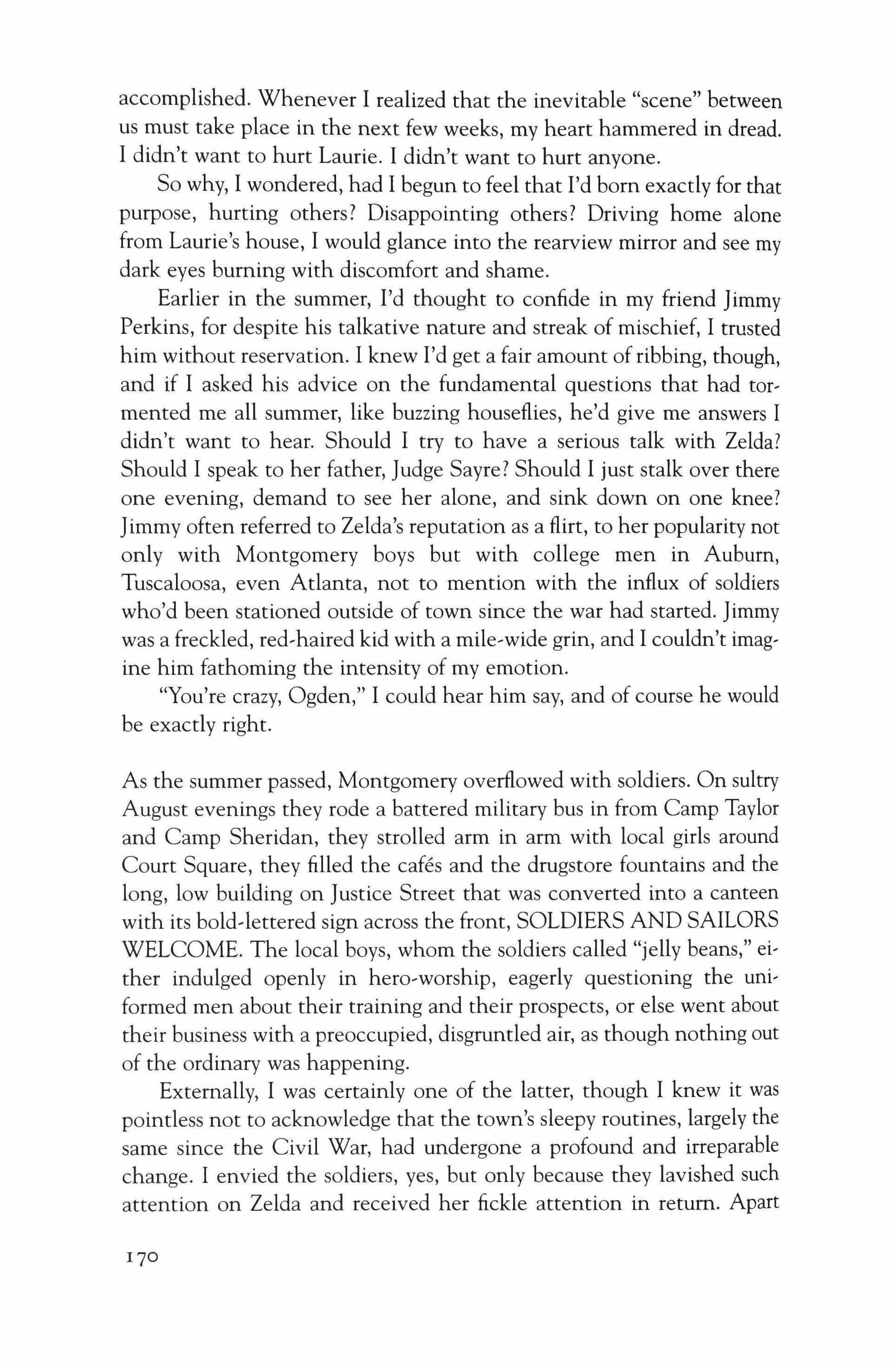
accomplished. Whenever I realized that the inevitable "scene" between us must take place in the next few weeks, my heart hammered in dread. I didn't want to hurt Laurie. I didn't want to hurt anyone.
So why, I wondered, had I begun to feel that I'd born exactly for that purpose, hurting others? Disappointing others? Driving home alone from Laurie's house, I would glance into the rearview mirror and see my dark eyes burning with discomfort and shame.
Earlier in the summer, I'd thought to confide in my friend Jimmy Perkins, for despite his talkative nature and streak of mischief, I trusted him without reservation. I knew I'd get a fair amount of ribbing, though, and if I asked his advice on the fundamental questions that had tormented me all summer, like buzzing houseflies, he'd give me answers I didn't want to hear. Should I try to have a serious talk with Zelda? Should I speak to her father, Judge Sayre? Should I just stalk over there one evening, demand to see her alone, and sink down on one knee? Jimmy often referred to Zelda's reputation as a flirt, to her popularity not only with Montgomery boys but with college men in Auburn, Tuscaloosa, even Atlanta, not to mention with the influx of soldiers who'd been stationed outside of town since the war had started. Jimmy was a freckled, red-haired kid with a mile-wide grin, and I couldn't imagine him fathoming the intensity of my emotion.
"You're crazy, Ogden," I could hear him say, and of course he would be exactly right.
As the summer passed, Montgomery overflowed with soldiers. On sultry August evenings they rode a battered military bus in from Camp Taylor and Camp Sheridan, they strolled arm in arm with local girls around Court Square, they filled the cafes and the drugstore fountains and the long, low building on Justice Street that was converted into a canteen with its bold-lettered sign across the front, SOLDIERS AND SAILORS WELCOME. The local boys, whom the soldiers called "jelly beans," either indulged openly in hero-worship, eagerly questioning the uniformed men about their training and their prospects, or else went about their business with a preoccupied, disgruntled air, as though nothing out of the ordinary was happening.
Externally, I was certainly one of the latter, though I knew it was pointless not to acknowledge that the town's sleepy routines, largely the same since the Civil War, had undergone a profound and irreparable change. I envied the soldiers, yes, but only because they lavished such attention on Zelda and received her fickle attention in return. Apart
170
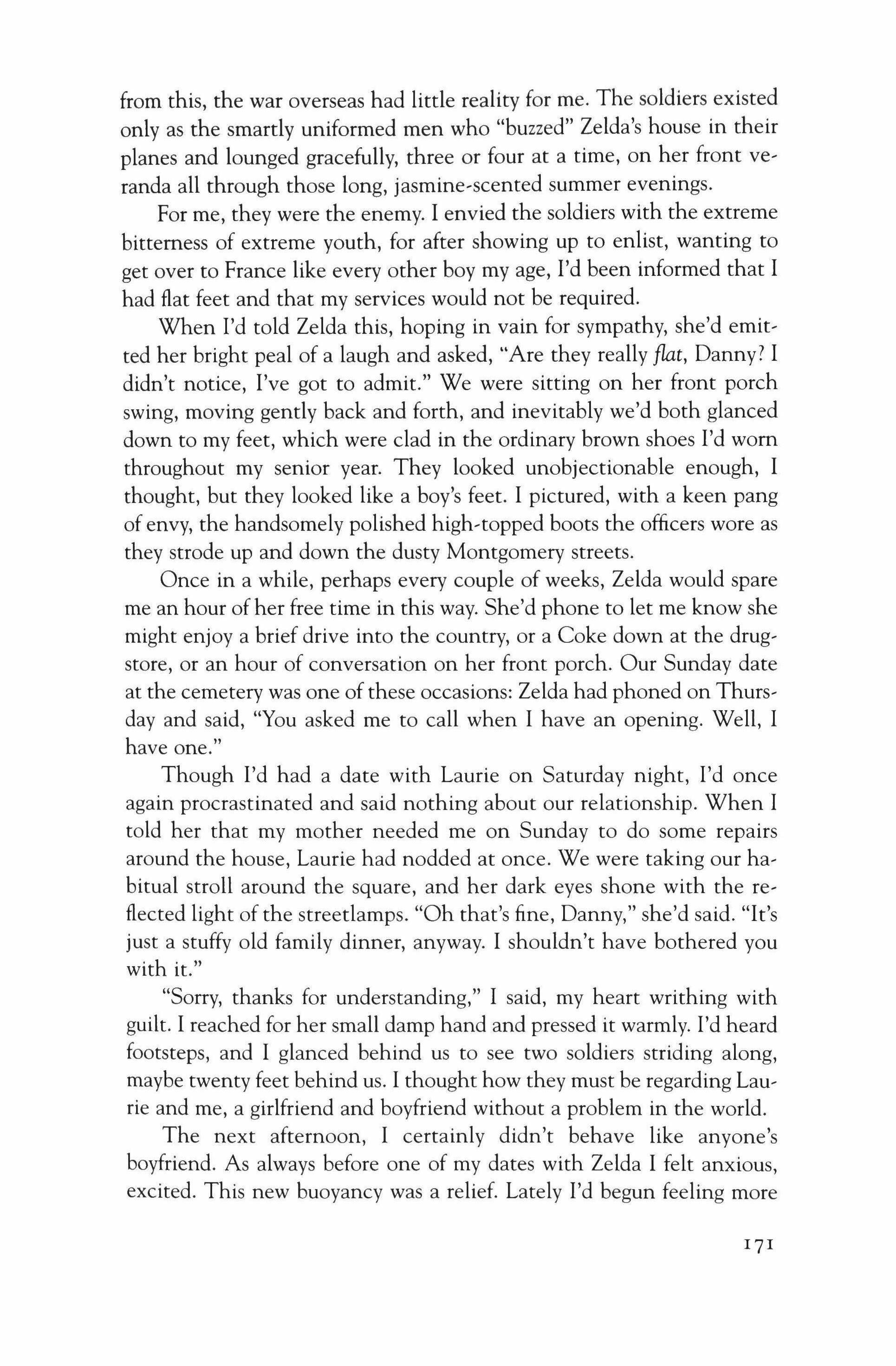
from this, the war overseas had little reality for me. The soldiers existed only as the smartly uniformed men who "buzzed" Zelda's house in their planes and lounged gracefully, three or four at a time, on her front veranda all through those long, jasmine-scented summer evenings.
For me, they were the enemy. I envied the soldiers with the extreme bitterness of extreme youth, for after showing up to enlist, wanting to get over to France like every other boy my age, I'd been informed that I had flat feet and that my services would not be required.
When I'd told Zelda this, hoping in vain for sympathy, she'd emitted her bright peal of a laugh and asked, "Are they really flat, Danny? I didn't notice, I've got to admit." We were sitting on her front porch swing, moving gently back and forth, and inevitably we'd both glanced down to my feet, which were clad in the ordinary brown shoes I'd worn throughout my senior year. They looked unobjectionable enough, I thought, but they looked like a boy's feet. I pictured, with a keen pang of envy, the handsomely polished high-topped boots the officers wore as they strode up and down the dusty Montgomery streets.
Once in a while, perhaps every couple of weeks, Zelda would spare me an hour ofher free time in this way. She'd phone to let me know she might enjoy a brief drive into the country, or a Coke down at the drugstore, or an hour of conversation on her front porch. Our Sunday date at the cemetery was one of these occasions: Zelda had phoned on Thursday and said, "You asked me to call when I have an opening. Well, I have one."
Though I'd had a date with Laurie on Saturday night, I'd once again procrastinated and said nothing about our relationship. When I told her that my mother needed me on Sunday to do some repairs around the house, Laurie had nodded at once. We were taking our habitual stroll around the square, and her dark eyes shone with the reflected light of the streetlamps. "Oh that's fine, Danny," she'd said. "It's just a stuffy old family dinner, anyway. I shouldn't have bothered you with it."
"Sorry, thanks for understanding," I said, my heart writhing with guilt. I reached for her small damp hand and pressed it warmly. I'd heard footsteps, and I glanced behind us to see two soldiers striding along, maybe twenty feet behind us. I thought how they must be regarding Laurie and me, a girlfriend and boyfriend without a problem in the world.
The next afternoon, I certainly didn't behave like anyone's boyfriend. As always before one of my dates with Zelda I felt anxious, excited. This new buoyancy was a relief. Lately I'd begun feeling more
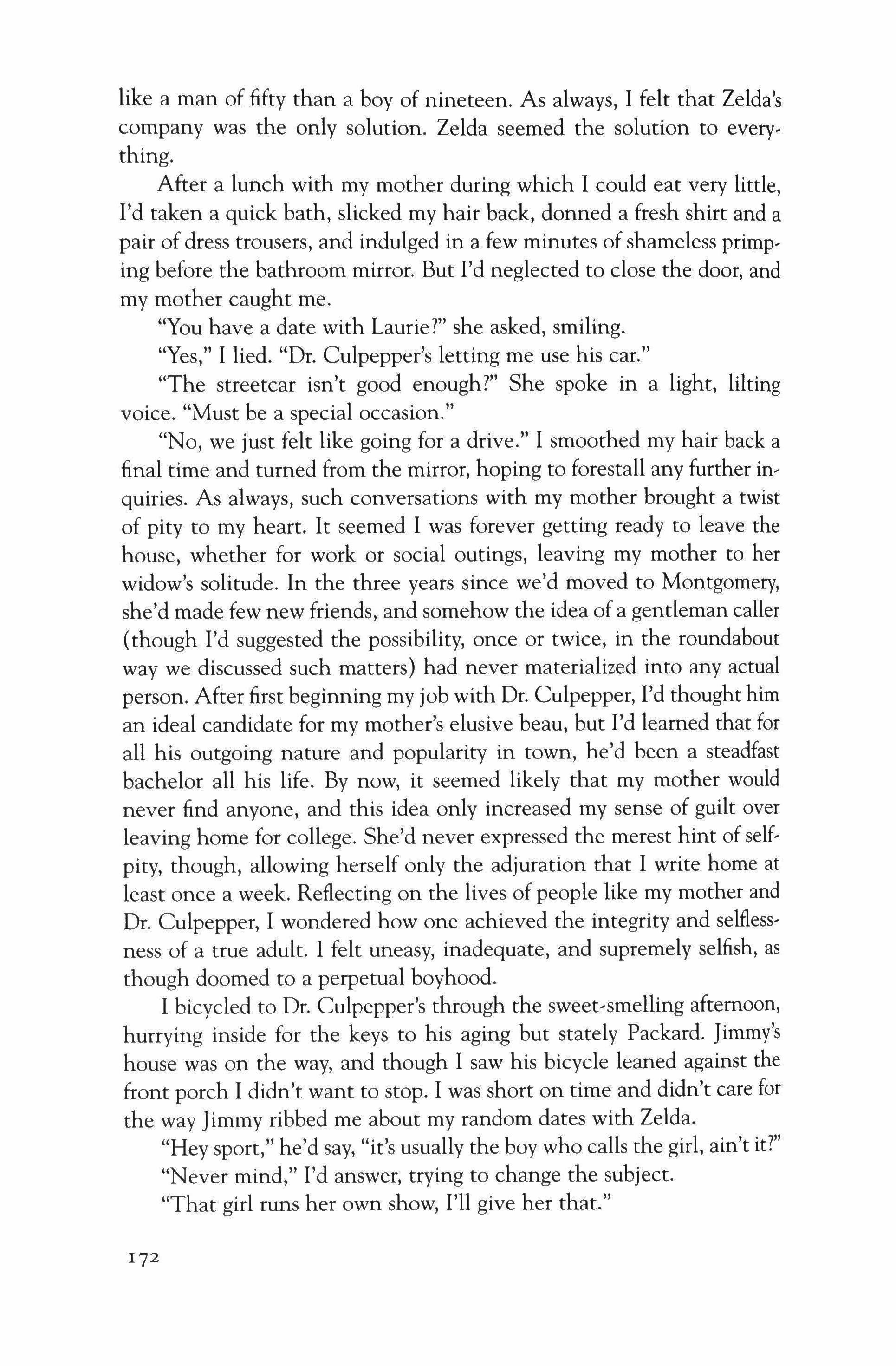
like a man of fifty than a boy of nineteen. As always, I felt that Zelda's company was the only solution. Zelda seemed the solution to everything.
After a lunch with my mother during which I could eat very little, I'd taken a quick bath, slicked my hair back, donned a fresh shirt and a pair of dress trousers, and indulged in a few minutes of shameless primping before the bathroom mirror. But I'd neglected to close the door, and my mother caught me.
"You have a date with Laurie?" she asked, smiling.
"Yes," I lied. "Dr. Culpepper's letting me use his car."
"The streetcar isn't good enough?" She spoke in a light, lilting voice. "Must be a special occasion."
"No, we just felt like going for a drive." I smoothed my hair back a final time and turned from the mirror, hoping to forestall any further inquiries. As always, such conversations with my mother brought a twist of pity to my heart. It seemed I was forever getting ready to leave the house, whether for work or social outings, leaving my mother to her widow's solitude. In the three years since we'd moved to Montgomery, she'd made few new friends, and somehow the idea of a gentleman caller (though I'd suggested the possibility, once or twice, in the roundabout way we discussed such matters) had never materialized into any actual person. After first beginning my job with Dr. Culpepper, I'd thought him an ideal candidate for my mother's elusive beau, but I'd learned that for all his outgoing nature and popularity in town, he'd been a steadfast bachelor all his life. By now, it seemed likely that my mother would never find anyone, and this idea only increased my sense of guilt over leaving home for college. She'd never expressed the merest hint of selfpity, though, allowing herself only the adjuration that I write home at least once a week. Reflecting on the lives of people like my mother and Dr. Culpepper, I wondered how one achieved the integrity and selflessness of a true adult. I felt uneasy, inadequate, and supremely selfish, as though doomed to a perpetual boyhood.
I bicycled to Dr. Culpepper's through the sweet-smelling afternoon, hurrying inside for the keys to his aging but stately Packard. Jimmy's house was on the way, and though I saw his bicycle leaned against the front porch I didn't want to stop. I was short on time and didn't care for the way Jimmy ribbed me about my random dates with Zelda.
"Hey sport," he'd say, "it's usually the boy who calls the girl, ain't it?"
"Never mind," I'd answer, trying to change the subject.
"That girl runs her own show, I'll give her that."
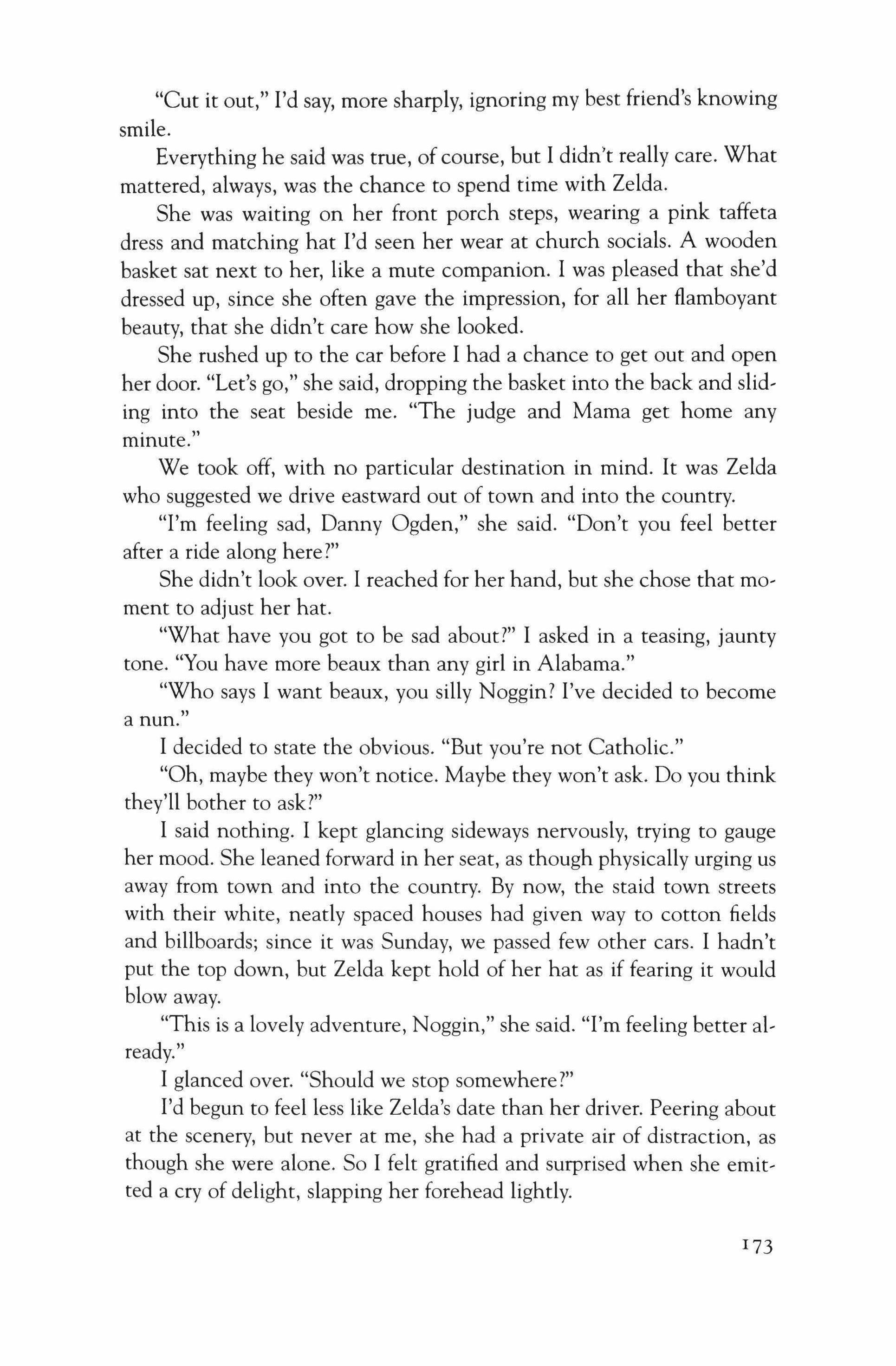
"Cut it out," I'd say, more sharply, ignoring my best friend's knowing smile.
Everything he said was true, of course, but I didn't really care. What mattered, always, was the chance to spend time with Zelda.
She was waiting on her front porch steps, wearing a pink taffeta dress and matching hat I'd seen her wear at church socials. A wooden basket sat next to her, like a mute companion. I was pleased that she'd dressed up, since she often gave the impression, for all her flamboyant beauty, that she didn't care how she looked.
She rushed up to the car before I had a chance to get out and open her door. "Let's go," she said, dropping the basket into the back and sliding into the seat beside me. "The judge and Mama get home any minute."
We took off, with no particular destination in mind. It was Zelda who suggested we drive eastward out of town and into the country.
"I'm feeling sad, Danny Ogden," she said. "Don't you feel better after a ride along here?"
She didn't look over. I reached for her hand, but she chose that moment to adjust her hat.
"What have you got to be sad about?" I asked in a teasing, jaunty tone. "You have more beaux than any girl in Alabama."
"Who says I want beaux, you silly Noggin? I've decided to become a nun."
I decided to state the obvious. "But you're not Catholic."
"Oh, maybe they won't notice. Maybe they won't ask. Do you think they'll bother to ask?"
I said nothing. I kept glancing sideways nervously, trying to gauge her mood. She leaned forward in her seat, as though physically urging us away from town and into the country. By now, the staid town streets with their white, neatly spaced houses had given way to cotton fields and billboards; since it was Sunday, we passed few other cars. I hadn't put the top down, but Zelda kept hold of her hat as if fearing it would blow away.
"This is a lovely adventure, Noggin," she said. "I'm feeling better already."
I glanced over. "Should we stop somewhere?"
I'd begun to feel less like Zelda's date than her driver. Peering about at the scenery, but never at me, she had a private air of distraction, as though she were alone. So I felt gratified and surprised when she emitted a cry of delight, slapping her forehead lightly.
173
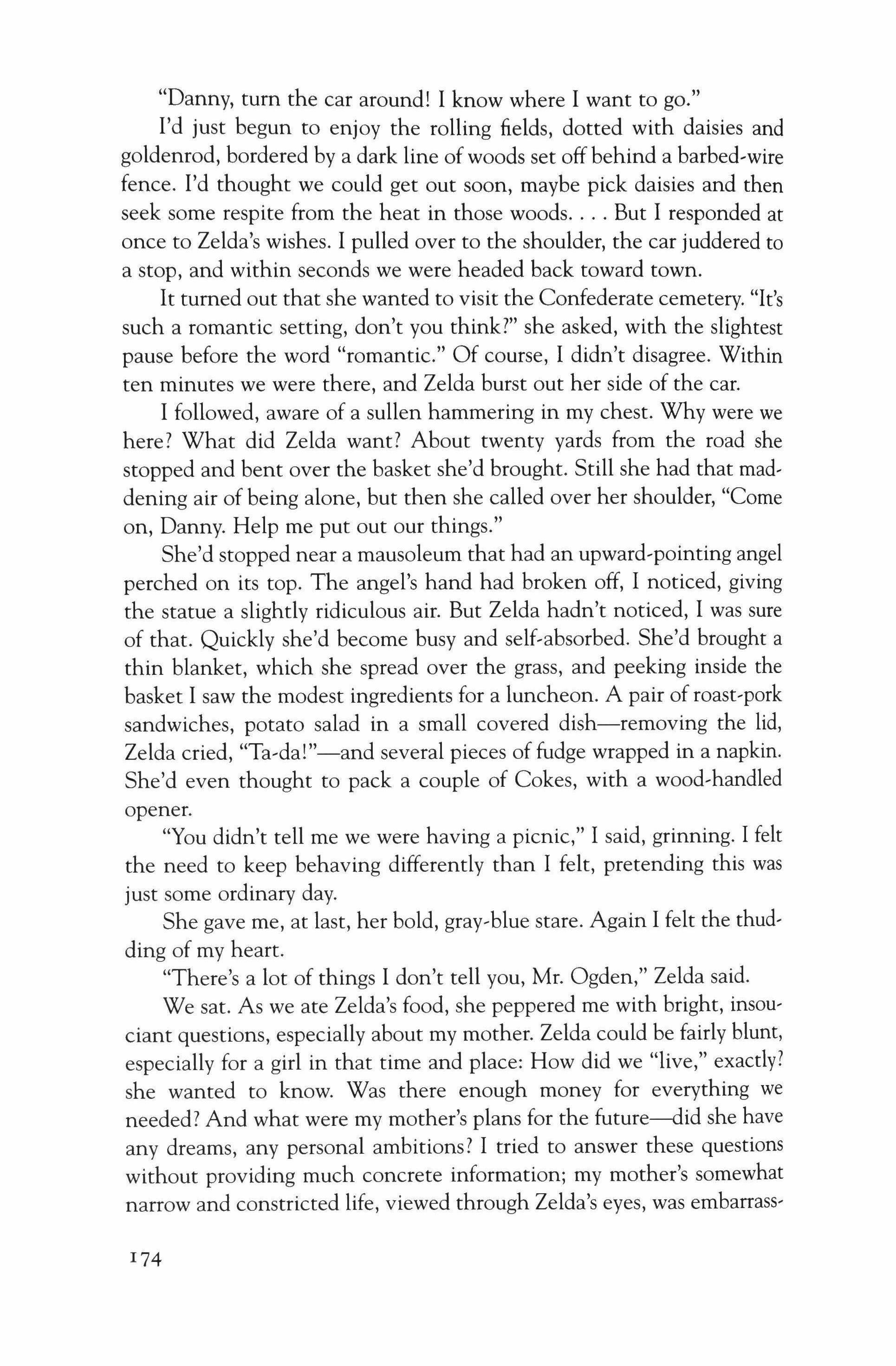
"Danny, turn the car around! I know where I want to go."
I'd just begun to enjoy the rolling fields, dotted with daisies and goldenrod, bordered by a dark line of woods set off behind a barbed,wire fence. I'd thought we could get out soon, maybe pick daisies and then seek some respite from the heat in those woods But I responded at once to Zelda's wishes. I pulled over to the shoulder, the car juddered to a stop, and within seconds we were headed back toward town.
It turned out that she wanted to visit the Confederate cemetery. "It's such a romantic setting, don't you think?" she asked, with the slightest pause before the word "romantic." Of course, I didn't disagree. Within ten minutes we were there, and Zelda burst out her side of the car.
I followed, aware of a sullen hammering in my chest. Why were we here? What did Zelda want? About twenty yards from the road she stopped and bent over the basket she'd brought. Still she had that maddening air of being alone, but then she called over her shoulder, "Come on, Danny. Help me put out our things."
She'd stopped near a mausoleum that had an upward-pointing angel perched on its top. The angel's hand had broken off, I noticed, giving the statue a slightly ridiculous air. But Zelda hadn't noticed, I was sure of that. Quickly she'd become busy and self-absorbed. She'd brought a thin blanket, which she spread over the grass, and peeking inside the basket I saw the modest ingredients for a luncheon. A pair of roast-pork sandwiches, potato salad in a small covered dish-removing the lid, Zelda cried, "Ta-da!"-and several pieces of fudge wrapped in a napkin. She'd even thought to pack a couple of Cokes, with a wood-handled opener.
"You didn't tell me we were having a picnic," I said, grinning. I felt the need to keep behaving differently than I felt, pretending this was just some ordinary day.
She gave me, at last, her bold, gray-blue stare. Again I felt the thudding of my heart.
"There's a lot of things I don't tell you, Mr. Ogden," Zelda said.
We sat. As we ate Zelda's food, she peppered me with bright, insouciant questions, especially about my mother. Zelda could be fairly blunt, especially for a girl in that time and place: How did we "live," exactly? she wanted to know. Was there enough money for everything we needed? And what were my mother's plans for the future--did she have any dreams, any personal ambitions? I tried to answer these questions without providing much concrete information; my mother's somewhat narrow and constricted life, viewed through Zelda's eyes, was embarrass-
174
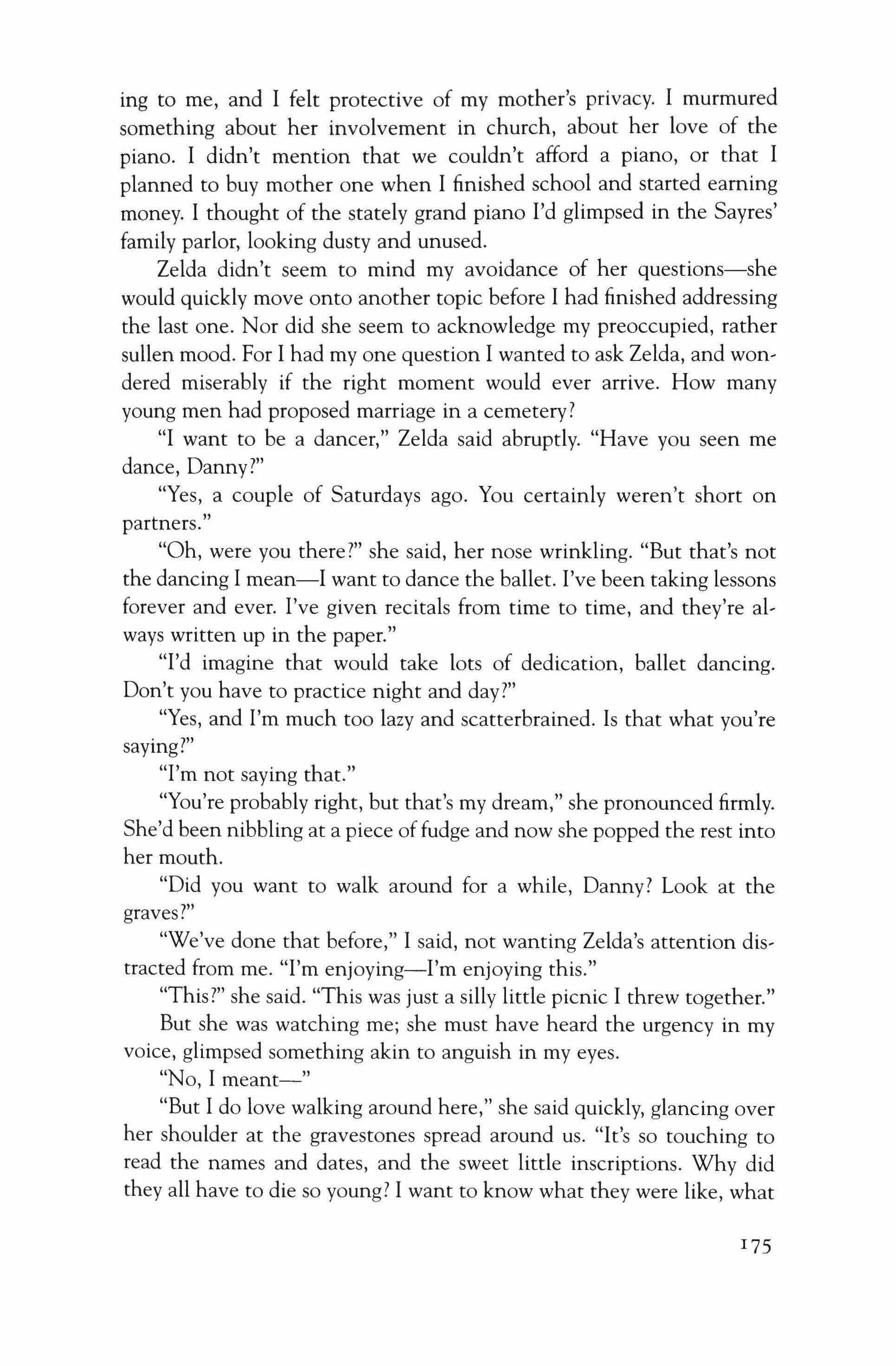
ing to me, and I felt protective of my mother's privacy. I murmured something about her involvement in church, about her love of the piano. I didn't mention that we couldn't afford a piano, or that I planned to buy mother one when I finished school and started earning money. I thought of the stately grand piano I'd glimpsed in the Sayres' family parlor, looking dusty and unused.
Zelda didn't seem to mind my avoidance of her questions-she would quickly move onto another topic before I had finished addressing the last one. Nor did she seem to acknowledge my preoccupied, rather sullen mood. For I had my one question I wanted to ask Zelda, and wondered miserably if the right moment would ever arrive. How many young men had proposed marriage in a cemetery?
"I want to be a dancer," Zelda said abruptly. "Have you seen me dance, Danny?"
"Yes, a couple of Saturdays ago. You certainly weren't short on partners."
"Oh, were you there?" she said, her nose wrinkling. "But that's not the dancing I mean-I want to dance the ballet. I've been taking lessons forever and ever. I've given recitals from time to time, and they're always written up in the paper."
"I'd imagine that would take lots of dedication, ballet dancing. Don't you have to practice night and day?"
"Yes, and I'm much too lazy and scatterbrained. Is that what you're saying?"
"I'm not saying that."
"You're probably right, but that's my dream," she pronounced firmly. She'd been nibbling at a piece offudge and now she popped the rest into her mouth.
"Did you want to walk around for a while, Danny? Look at the graves?"
"We've done that before," I said, not wanting Zelda's attention distracted from me. "I'm enjoying-I'm enjoying this."
"This?" she said. "This was just a silly little picnic I threw together."
But she was watching me; she must have heard the urgency in my voice, glimpsed something akin to anguish in my eyes.
"No, I meant-"
"But I do love walking around here," she said quickly, glancing over her shoulder at the gravestones spread around us. "It's so touching to read the names and dates, and the sweet little inscriptions. Why did they all have to die so young? I want to know what they were like, what
I75
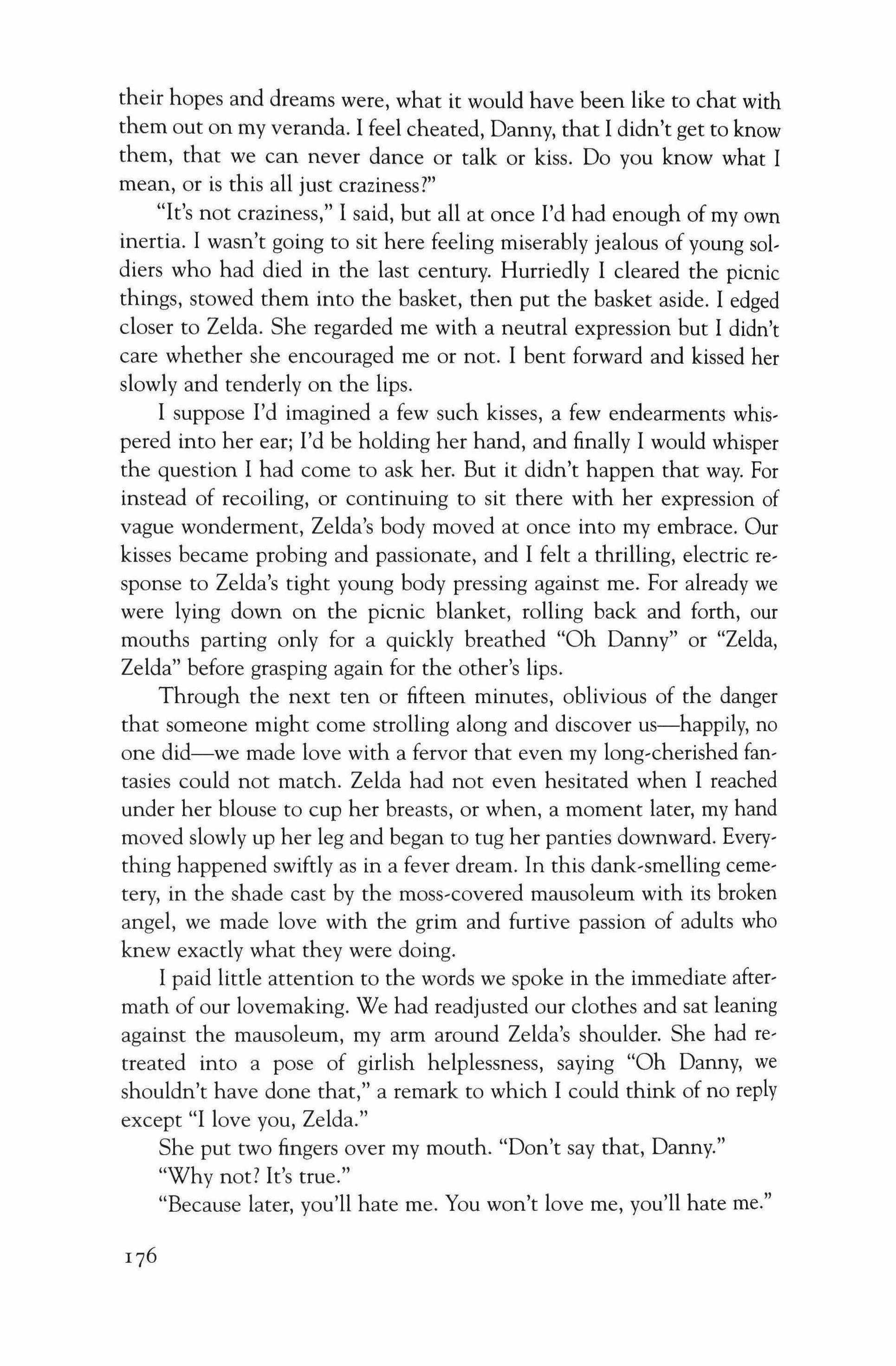
their hopes and dreams were, what it would have been like to chat with them out on my veranda. I feel cheated, Danny, that I didn't get to know them, that we can never dance or talk or kiss. Do you know what I mean, or is this all just craziness?"
"It's not craziness," I said, but all at once I'd had enough of my own inertia. I wasn't going to sit here feeling miserably jealous of young soldiers who had died in the last century. Hurriedly I cleared the picnic things, stowed them into the basket, then put the basket aside. I edged closer to Zelda. She regarded me with a neutral expression but I didn't care whether she encouraged me or not. I bent forward and kissed her slowly and tenderly on the lips.
I suppose I'd imagined a few such kisses, a few endearments whispered into her ear; I'd be holding her hand, and finally I would whisper the question I had come to ask her. But it didn't happen that way. For instead of recoiling, or continuing to sit there with her expression of vague wonderment, Zelda's body moved at once into my embrace. Our kisses became probing and passionate, and I felt a thrilling, electric response to Zelda's tight young body pressing against me. For already we were lying down on the picnic blanket, rolling back and forth, our mouths parting only for a quickly breathed "Oh Danny" or "Zelda, Zelda" before grasping again for the other's lips.
Through the next ten or fifteen minutes, oblivious of the danger that someone might come strolling along and discover us-happily, no one did-we made love with a fervor that even my long-cherished fantasies could not match. Zelda had not even hesitated when I reached under her blouse to cup her breasts, or when, a moment later, my hand moved slowly up her leg and began to tug her panties downward. Everything happened swiftly as in a fever dream. In this dank-smelling cemetery, in the shade cast by the moss-covered mausoleum with its broken angel, we made love with the grim and furtive passion of adults who knew exactly what they were doing.
I paid little attention to the words we spoke in the immediate aftermath of our lovemaking. We had readjusted our clothes and sat leaning against the mausoleum, my arm around Zelda's shoulder. She had retreated into a pose of girlish helplessness, saying "Oh Danny, we shouldn't have done that," a remark to which I could think of no reply except "I love you, Zelda."
She put two fingers over my mouth. "Don't say that, Danny."
"Why not? It's true."
"Because later, you'll hate me. You won't love me, you'll hate me."
176
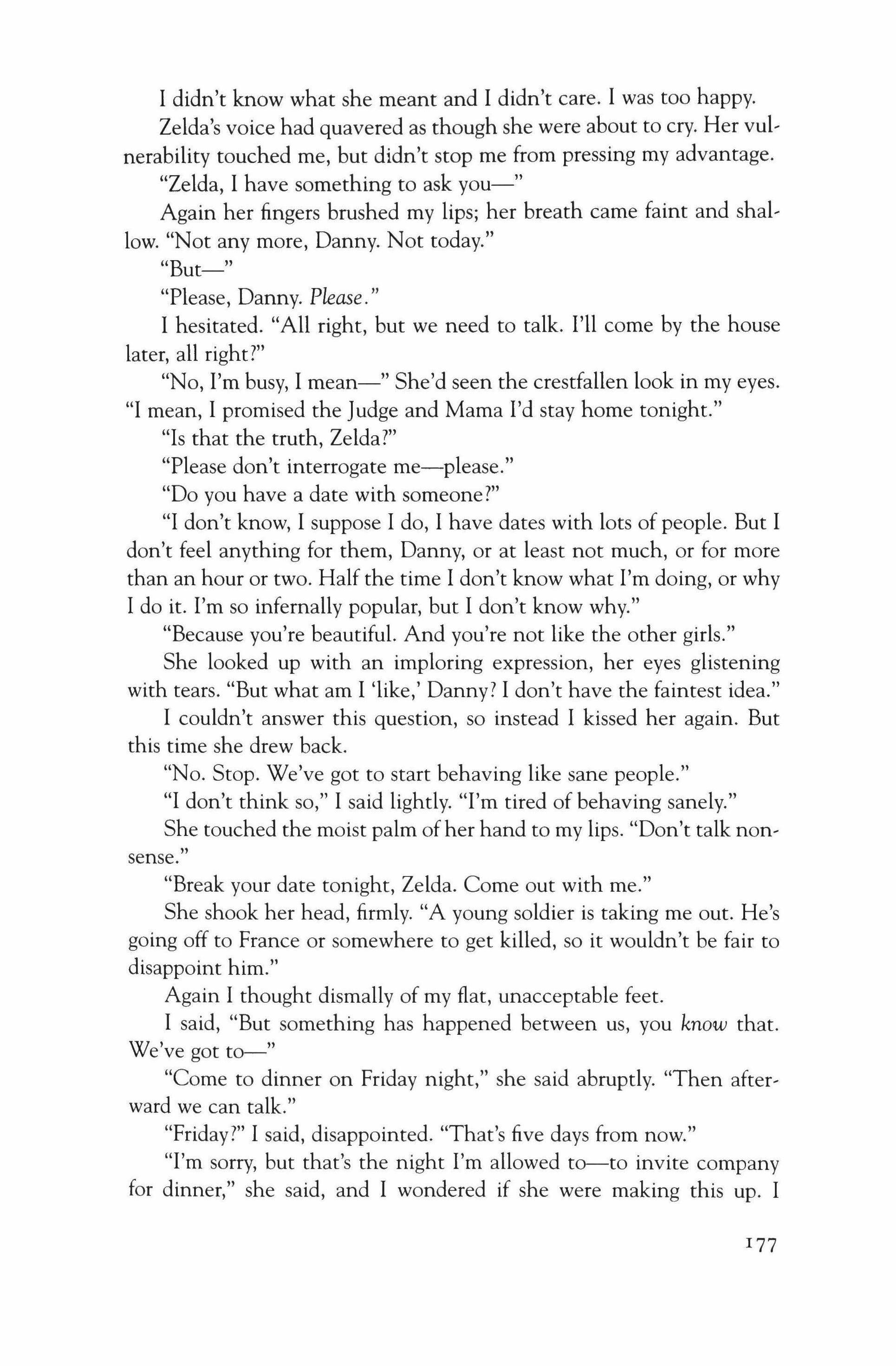
I didn't know what she meant and I didn't care. I was too happy.
Zelda's voice had quavered as though she were about to cry. Her vulnerability touched me, but didn't stop me from pressing my advantage.
"Zelda, I have something to ask you-"
Again her fingers brushed my lips; her breath came faint and shallow. "Not any more, Danny. Not today."
"But-"
"Please, Danny. Please."
I hesitated. "All right, but we need to talk. I'll come by the house later, all right?"
"No, I'm busy, I mean-" She'd seen the crestfallen look in my eyes. "I mean, I promised the Judge and Mama I'd stay home tonight."
"Is that the truth, Zelda?"
"Please don't interrogate me-please."
"Do you have a date with someone?"
"I don't know, I suppose I do, I have dates with lots of people. But I don't feel anything for them, Danny, or at least not much, or for more than an hour or two. Half the time I don't know what I'm doing, or why I do it. I'm so infernally popular, but I don't know why."
"Because you're beautiful. And you're not like the other girls."
She looked up with an imploring expression, her eyes glistening with tears. "But what am I 'like,' Danny? I don't have the faintest idea."
I couldn't answer this question, so instead I kissed her again. But this time she drew back.
"No. Stop. We've got to start behaving like sane people."
"I don't think so," I said lightly. "I'm tired of behaving sanely."
She touched the moist palm ofher hand to my lips. "Don't talk nonsense."
"Break your date tonight, Zelda. Come out with me."
She shook her head, firmly. "A young soldier is taking me out. He's going off to France or somewhere to get killed, so it wouldn't be fair to disappoint him."
Again I thought dismally of my flat, unacceptable feet.
I said, "But something has happened between us, you know that. We've got to-"
"Come to dinner on Friday night," she said abruptly. "Then afterward we can talk."
"Friday?" I said, disappointed. "That's five days from now."
"I'm sorry, but that's the night I'm allowed to-to invite company for dinner," she said, and I wondered if she were making this up. I
177
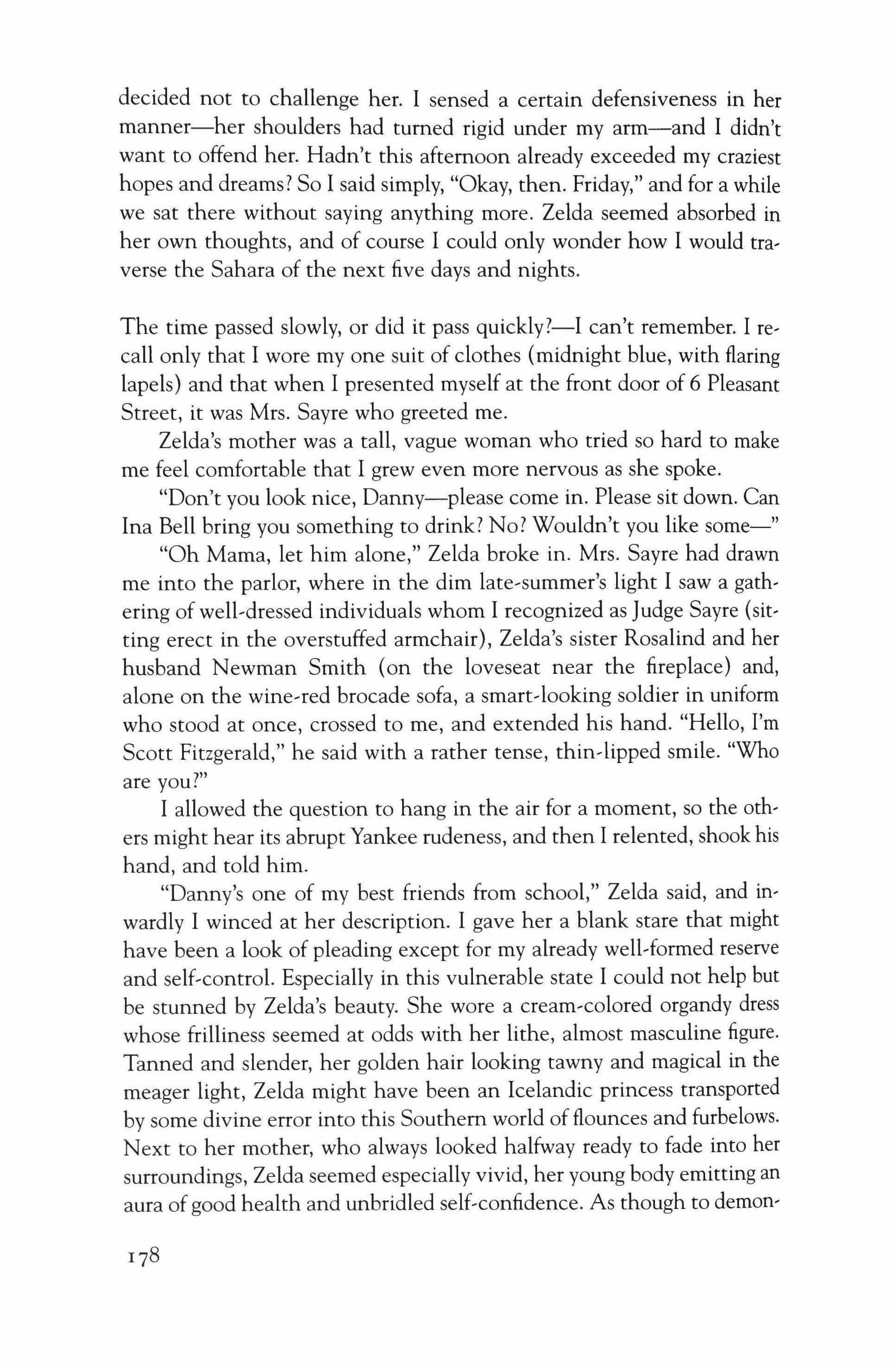
decided not to challenge her. I sensed a certain defensiveness in her manner-her shoulders had turned rigid under my arm-and I didn't want to offend her. Hadn't this afternoon already exceeded my craziest hopes and dreams? So I said simply, "Okay, then. Friday," and for a while we sat there without saying anything more. Zelda seemed absorbed in her own thoughts, and of course I could only wonder how I would traverse the Sahara of the next five days and nights.
The time passed slowly, or did it pass quickly?-I can't remember. I recall only that I wore my one suit of clothes (midnight blue, with flaring lapels) and that when I presented myself at the front door of 6 Pleasant Street, it was Mrs. Sayre who greeted me.
Zelda's mother was a tall, vague woman who tried so hard to make me feel comfortable that I grew even more nervous as she spoke.
"Don't you look nice, Danny-please come in. Please sit down. Can Ina Bell bring you something to drink? No? Wouldn't you like some-"
"Oh Mama, let him alone," Zelda broke in. Mrs. Sayre had drawn me into the parlor, where in the dim late-summer's light I saw a gathering of well-dressed individuals whom I recognized as Judge Sayre (sitting erect in the overstuffed armchair), Zelda's sister Rosalind and her husband Newman Smith (on the loveseat near the fireplace) and, alone on the wine-red brocade sofa, a smart-looking soldier in uniform who stood at once, crossed to me, and extended his hand. "Hello, I'm Scott Fitzgerald," he said with a rather tense, thin-lipped smile. "Who are you?"
I allowed the question to hang in the air for a moment, so the others might hear its abrupt Yankee rudeness, and then I relented, shook his hand, and told him.
"Danny's one of my best friends from school," Zelda said, and inwardly I winced at her description. I gave her a blank stare that might have been a look of pleading except for my already well-formed reserve and self-control. Especially in this vulnerable state I could not help but be stunned by Zelda's beauty. She wore a cream-colored organdy dress whose frilliness seemed at odds with her lithe, almost masculine figure. Tanned and slender, her golden hair looking tawny and magical in the meager light, Zelda might have been an Icelandic princess transported by some divine error into this Southern world of flounces and furbelows. Next to her mother, who always looked halfway ready to fade into her surroundings, Zelda seemed especially vivid, her young body emitting an aura ofgood health and unbridled self-confidence. As though to demon-
178
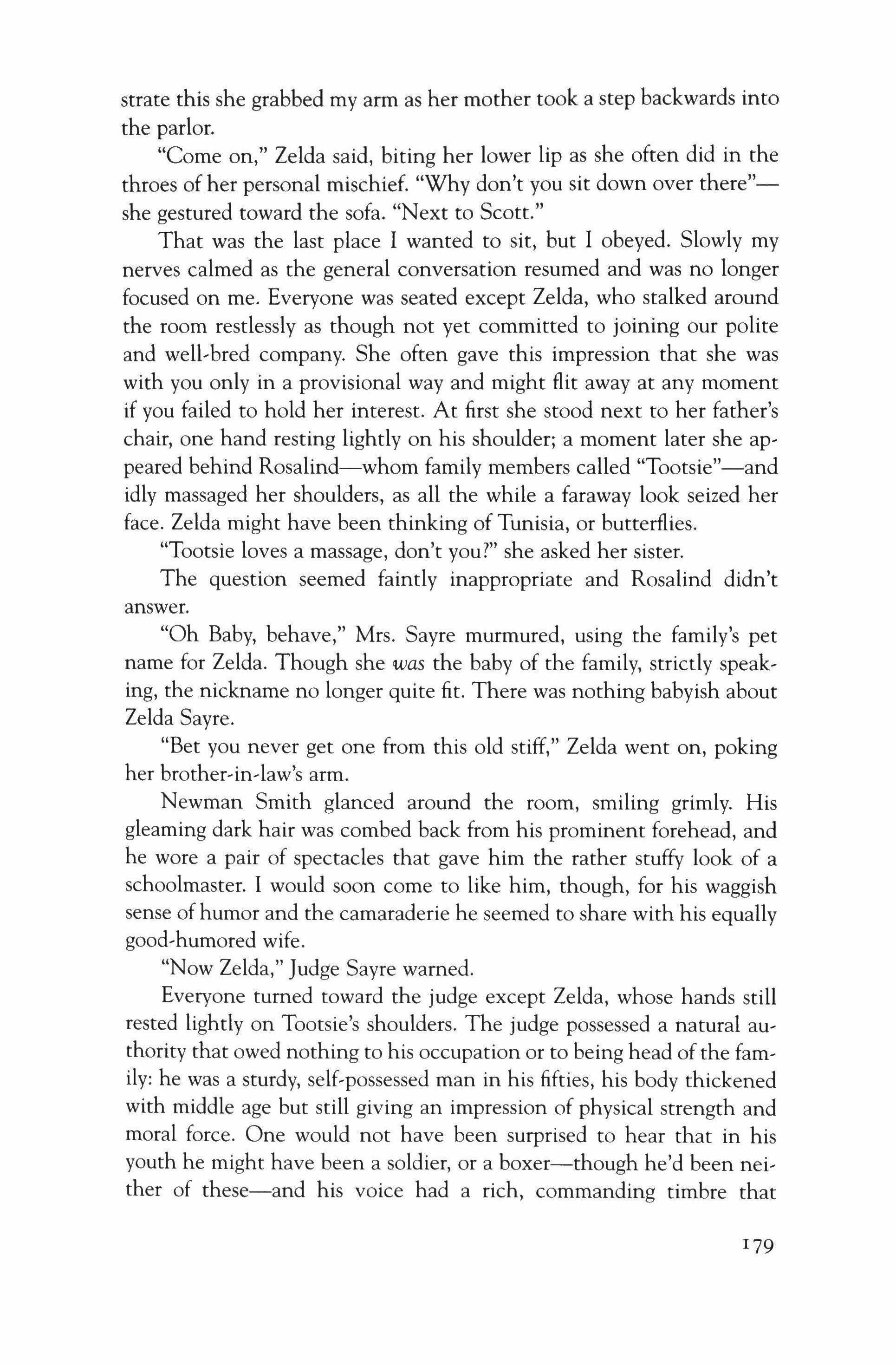
strate this she grabbed my arm as her mother took a step backwards into the parlor.
"Come on," Zelda said, biting her lower lip as she often did in the throes of her personal mischief. "Why don't you sit down over there"she gestured toward the sofa. "Next to Scott."
That was the last place I wanted to sit, but I obeyed. Slowly my nerves calmed as the general conversation resumed and was no longer focused on me. Everyone was seated except Zelda, who stalked around the room restlessly as though not yet committed to joining our polite and well-bred company. She often gave this impression that she was with you only in a provisional way and might flit away at any moment if you failed to hold her interest. At first she stood next to her father's chair, one hand resting lightly on his shoulder; a moment later she appeared behind Rosalind-whom family members called "Tootsie"-and idly massaged her shoulders, as all the while a faraway look seized her face. Zelda might have been thinking of Tunisia, or butterflies.
"Tootsie loves a massage, don't you?" she asked her sister.
The question seemed faintly inappropriate and Rosalind didn't answer.
"Oh Baby, behave," Mrs. Sayre murmured, using the family's pet name for Zelda. Though she was the baby of the family, strictly speak, ing, the nickname no longer quite fit. There was nothing babyish about Zelda Sayre.
"Bet you never get one from this old stiff," Zelda went on, poking her brother-in-law's arm.
Newman Smith glanced around the room, smiling grimly. His gleaming dark hair was combed back from his prominent forehead, and he wore a pair of spectacles that gave him the rather stuffy look of a schoolmaster. I would soon come to like him, though, for his waggish sense of humor and the camaraderie he seemed to share with his equally good,humored wife.
"Now Zelda," Judge Sayre warned.
Everyone turned toward the judge except Zelda, whose hands still rested lightly on Tootsie's shoulders. The judge possessed a natural au, thority that owed nothing to his occupation or to being head of the farnily: he was a sturdy, self-possessed man in his fifties, his body thickened with middle age but still giving an impression of physical strength and moral force. One would not have been surprised to hear that in his youth he might have been a soldier, or a boxer-though he'd been neither of these-and his voice had a rich, commanding timbre that
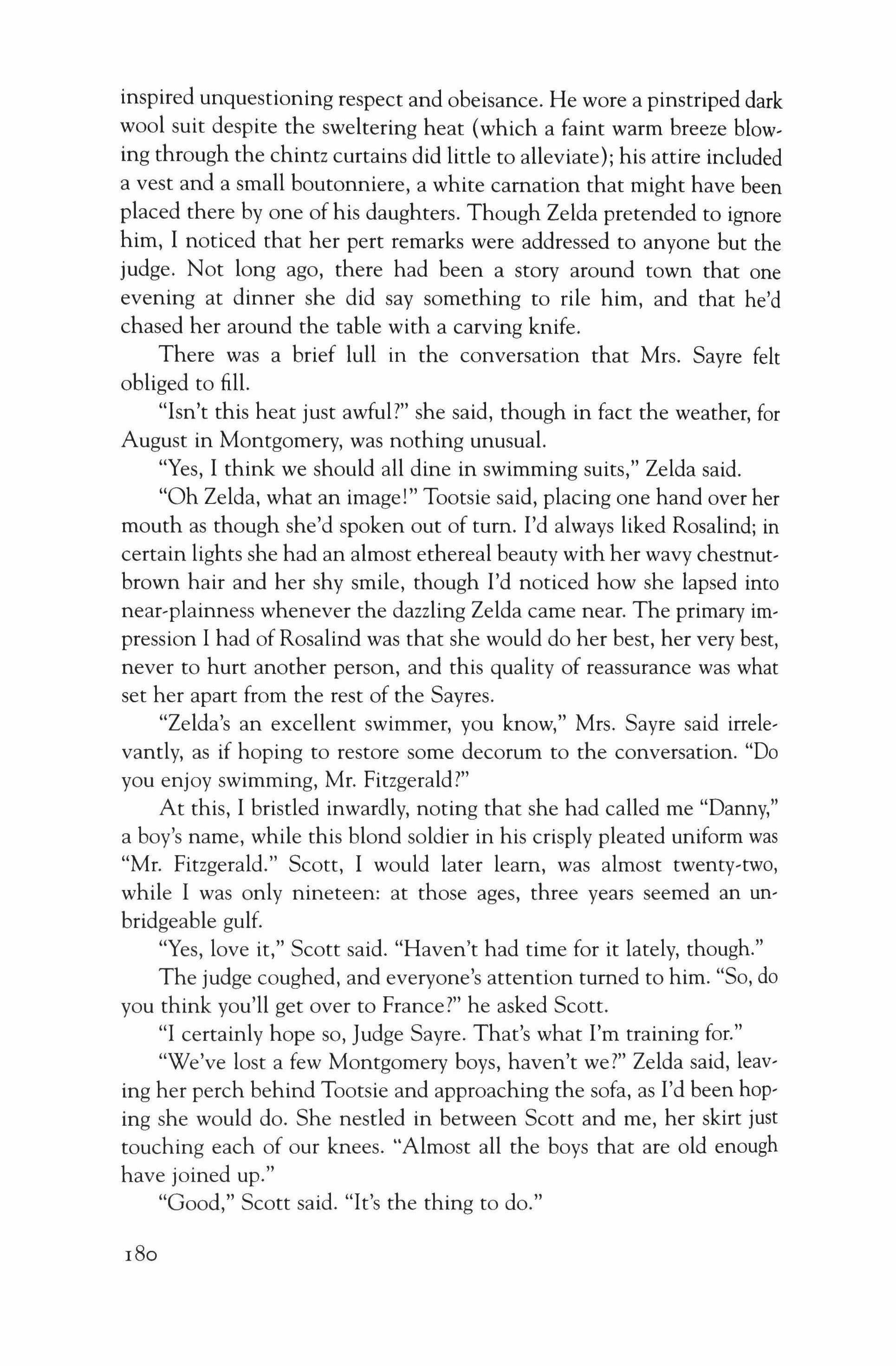
inspired unquestioning respect and obeisance. He wore a pinstriped dark wool suit despite the sweltering heat (which a faint warm breeze blowing through the chintz curtains did little to alleviate); his attire included a vest and a small boutonniere, a white carnation that might have been placed there by one of his daughters. Though Zelda pretended to ignore him, I noticed that her pert remarks were addressed to anyone but the judge. Not long ago, there had been a story around town that one evening at dinner she did say something to rile him, and that he'd chased her around the table with a carving knife.
There was a brief lull in the conversation that Mrs. Sayre felt obliged to fill.
"Isn't this heat just awful?" she said, though in fact the weather, for August in Montgomery, was nothing unusual.
"Yes, I think we should all dine in swimming suits," Zelda said.
"Oh Zelda, what an image!" Tootsie said, placing one hand over her mouth as though she'd spoken out of tum. I'd always liked Rosalind; in certain lights she had an almost ethereal beauty with her wavy chestnutbrown hair and her shy smile, though I'd noticed how she lapsed into near-plainness whenever the dazzling Zelda came near. The primary impression I had of Rosalind was that she would do her best, her very best, never to hurt another person, and this quality of reassurance was what set her apart from the rest of the Sayres.
"Zelda's an excellent swimmer, you know," Mrs. Sayre said irrelevantly, as if hoping to restore some decorum to the conversation. "Do you enjoy swimming, Mr. Fitzgerald?"
At this, I bristled inwardly, noting that she had called me "Danny," a boy's name, while this blond soldier in his crisply pleated uniform was "Mr. Fitzgerald." Scott, I would later learn, was almost twenty-two, while I was only nineteen: at those ages, three years seemed an unbridgeable gulf.
"Yes, love it," Scott said. "Haven't had time for it lately, though."
The judge coughed, and everyone's attention turned to him. "So, do you think you'll get over to France?" he asked Scott.
"I certainly hope so, Judge Sayre. That's what I'm training for."
"We've lost a few Montgomery boys, haven't we?" Zelda said, leaving her perch behind Tootsie and approaching the sofa, as I'd been hoping she would do. She nestled in between Scott and me, her skirt just touching each of our knees. "Almost all the boys that are old enough have joined up."
"Good," Scott said. "It's the thing to do."
180
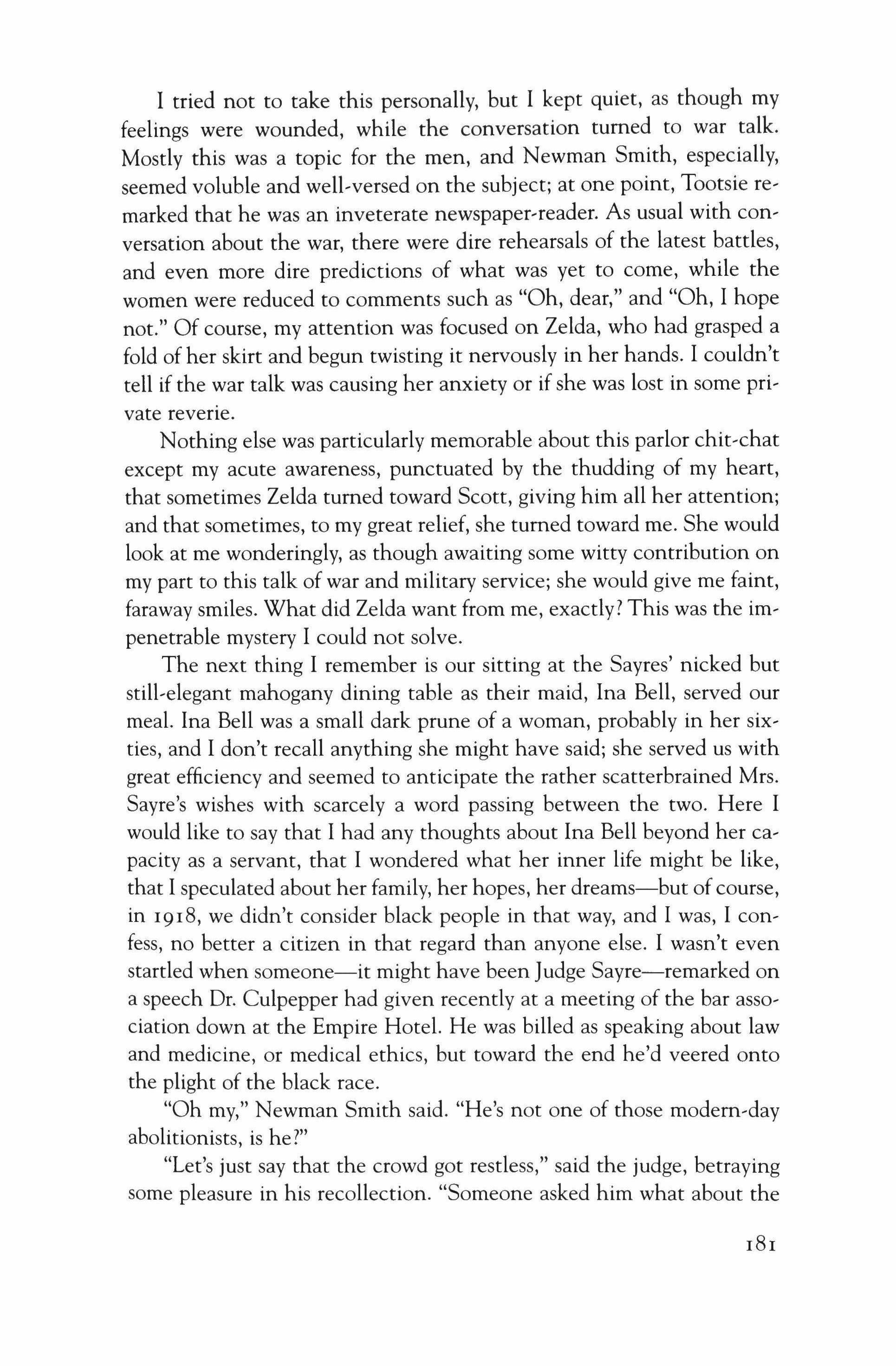
I tried not to take this personally, but I kept quiet, as though my feelings were wounded, while the conversation turned to war talk. Mostly this was a topic for the men, and Newman Smith, especially, seemed voluble and well-versed on the subject; at one point, Tootsie remarked that he was an inveterate newspaper-reader. As usual with conversation about the war, there were dire rehearsals of the latest battles, and even more dire predictions of what was yet to come, while the women were reduced to comments such as "Oh, dear," and "Oh, I hope not." Of course, my attention was focused on Zelda, who had grasped a fold of her skirt and begun twisting it nervously in her hands. I couldn't tell if the war talk was causing her anxiety or if she was lost in some private reverie.
Nothing else was particularly memorable about this parlor chit-chat except my acute awareness, punctuated by the thudding of my heart, that sometimes Zelda turned toward Scott, giving him all her attention; and that sometimes, to my great relief, she turned toward me. She would look at me wonderingly, as though awaiting some witty contribution on my part to this talk of war and military service; she would give me faint, faraway smiles. What did Zelda want from me, exactly? This was the impenetrable mystery I could not solve.
The next thing I remember is our sitting at the Sayres' nicked but still-elegant mahogany dining table as their maid, Ina Bell, served our meal. Ina Bell was a small dark prune of a woman, probably in her sixties, and I don't recall anything she might have said; she served us with great efficiency and seemed to anticipate the rather scatterbrained Mrs. Sayre's wishes with scarcely a word passing between the two. Here I would like to say that I had any thoughts about Ina Bell beyond her capacity as a servant, that I wondered what her inner life might be like, that I speculated about her family, her hopes, her dreams-but of course, in 19 I 8, we didn't consider black people in that way, and I was, I confess, no better a citizen in that regard than anyone else. I wasn't even startled when someone-it might have been Judge Sayre-remarked on a speech Dr. Culpepper had given recently at a meeting of the bar association down at the Empire Hotel. He was billed as speaking about law and medicine, or medical ethics, but toward the end he'd veered onto the plight of the black race.
"Oh my," Newman Smith said. "He's not one of those modem-day abolitionists, is he?"
"Let's just say that the crowd got restless," said the judge, betraying some pleasure in his recollection. "Someone asked him what about the
181
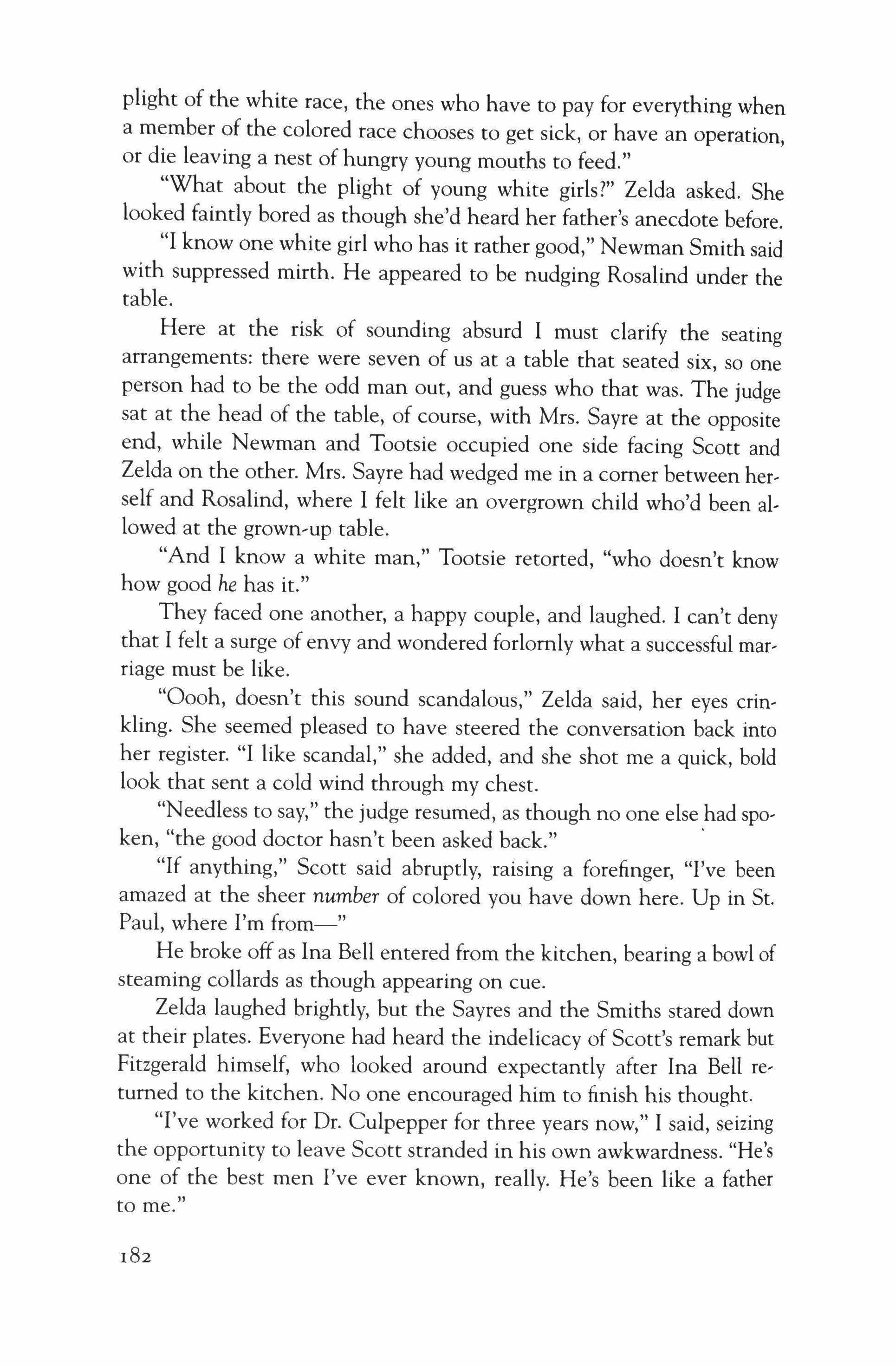
plight of the white race, the ones who have to pay for everything when a member of the colored race chooses to get sick, or have an operation, or die leaving a nest of hungry young mouths to feed."
"What about the plight of young white girls?" Zelda asked. She looked faintly bored as though she'd heard her father's anecdote before.
"I know one white girl who has it rather good," Newman Smith said with suppressed mirth. He appeared to be nudging Rosalind under the table.
Here at the risk of sounding absurd I must clarify the seating arrangements: there were seven of us at a table that seated six, so one person had to be the odd man out, and guess who that was. The judge sat at the head of the table, of course, with Mrs. Sayre at the opposite end, while Newman and Tootsie occupied one side facing Scott and Zelda on the other. Mrs. Sayre had wedged me in a comer between herself and Rosalind, where I felt like an overgrown child who'd been allowed at the grown-up table.
"And I know a white man," Tootsie retorted, "who doesn't know how good he has it."
They faced one another, a happy couple, and laughed. I can't deny that I felt a surge of envy and wondered forlornly what a successful marriage must be like.
"Oooh, doesn't this sound scandalous," Zelda said, her eyes crinkling. She seemed pleased to have steered the conversation back into her register. "I like scandal," she added, and she shot me a quick, bold look that sent a cold wind through my chest.
"Needless to say," the judge resumed, as though no one else had spoken, "the good doctor hasn't been asked back."
"If anything," Scott said abruptly, raising a forefinger, "I've been amazed at the sheer number of colored you have down here. Up in St. Paul, where I'm from-"
He broke off as Ina Bell entered from the kitchen, bearing a bowl of steaming collards as though appearing on cue.
Zelda laughed brightly, but the Sayres and the Smiths stared down at their plates. Everyone had heard the indelicacy of Scott's remark but Fitzgerald himself, who looked around expectantly after Ina Bell returned to the kitchen. No one encouraged him to finish his thought.
"I've worked for Dr. Culpepper for three years now," I said, seizing the opportunity to leave Scott stranded in his own awkwardness. "He's one of the best men I've ever known, really. He's been like a father to me."

"Oh, I don't doubt that he's a fine man," the judge agreed. "I don't take his opinions against him."
"And such an excellent doctor," Mrs. Sayre said. "I've never sent my children to anyone else."
Tootsie said, thoughtfully, "His office smells horrid, though. A combination of cigar smoke and-"
"And damp wool," Newman Smith finished. "I'll bet he hasn't opened a window in forty years."
I felt a little embarrassed for my employer. It's true that fine Havana cigars were his great weakness, something he'd cheerfully admit to patients. But I felt defensive, too, just as the Sayres felt defensive at any Yankee's daring to make observations on Montgomery's black population.
"He's a great man," I said, upping the ante.
Zelda gave a muffled exclamation, her hand fluttering to her mouth. This meant a thought had entered her head. "Did you know, everyone, that Dr. Culpepper is sending Danny here to Johns Hopkins?"
Everyone turned in my direction, bringing a warm flush of selfconsciousness to my face.
"He's not sending me, exactly," I said. "But he did pull a few strings, and I managed to get a scholarship."
"Danny's going to be a doctor," Zelda said, with a quick glance at Scott. "He's going to make lots and lots of money."
"Good for you, congratulations!" Tootsie and Newman cried, in unison.
"Well, medical school is a long way off," I said, hating that I'd become the focus of conversation. "First I have to do well as an undergraduate."
Even more did I hate the sophomoric pomposity of my own young voice!
"Oh, Lordy, listen to him," Zelda said. "He made all Ns at Sidney Lanier High, I'll have you know. And now he's going off to be a doctor-a famous doctor."
Zelda's hyperbole was both gratifying and embarrassing. I glanced around the table with the air of a man seeking an exit from an overcrowded room. The others, I was relieved to see, had turned back to their dinners, all except for Scott, who stared in my direction with that unmistakable look of one who has underestimated another person. I felt his need to say something to make up for this, which he presently did.
"That's good, really good. Society can always use another doctor."
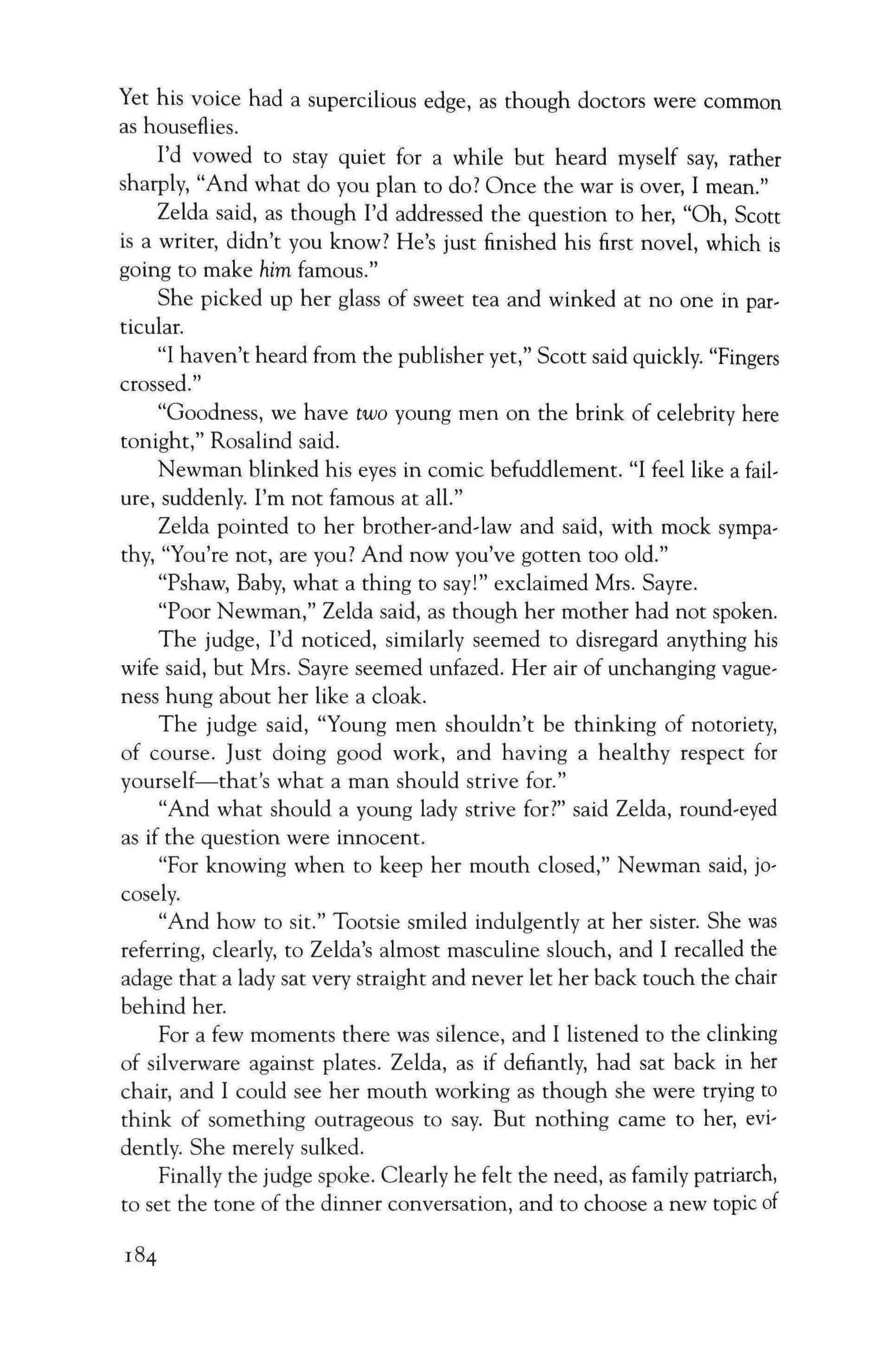
Yet his voice had a supercilious edge, as though doctors were common as houseflies.
I'd vowed to stay quiet for a while but heard myself say, rather sharply, "And what do you plan to do? Once the war is over, I mean."
Zelda said, as though I'd addressed the question to her, "Oh, Scott is a writer, didn't you know? He's just finished his first novel, which is going to make him famous."
She picked up her glass of sweet tea and winked at no one in particular.
"1 haven't heard from the publisher yet," Scott said quickly. "Fingers crossed."
"Goodness, we have two young men on the brink of celebrity here tonight," Rosalind said.
Newman blinked his eyes in comic befuddlement. "I feel like a failure, suddenly. I'm not famous at all."
Zelda pointed to her brother-and-law and said, with mock sympathy, "You're not, are you? And now you've gotten too old."
"Pshaw, Baby, what a thing to say!" exclaimed Mrs. Sayre.
"Poor Newman," Zelda said, as though her mother had not spoken.
The judge, I'd noticed, similarly seemed to disregard anything his wife said, but Mrs. Sayre seemed unfazed. Her air of unchanging vagueness hung about her like a cloak.
The judge said, "Young men shouldn't be thinking of notoriety, of course. Just doing good work, and having a healthy respect for yourself-that's what a man should strive for."
"And what should a young lady strive for?" said Zelda, round-eyed as if the question were innocent.
"For knowing when to keep her mouth closed," Newman said, jocosely.
"And how to sit." Tootsie smiled indulgently at her sister. She was referring, clearly, to Zelda's almost masculine slouch, and I recalled the adage that a lady sat very straight and never let her back touch the chair behind her.
For a few moments there was silence, and I listened to the clinking of silverware against plates. Zelda, as if defiantly, had sat back in her chair, and I could see her mouth working as though she were trying to think of something outrageous to say. But nothing came to her, evidently. She merely sulked.
Finally the judge spoke. Clearly he felt the need, as family patriarch, to set the tone of the dinner conversation, and to choose a new topic of
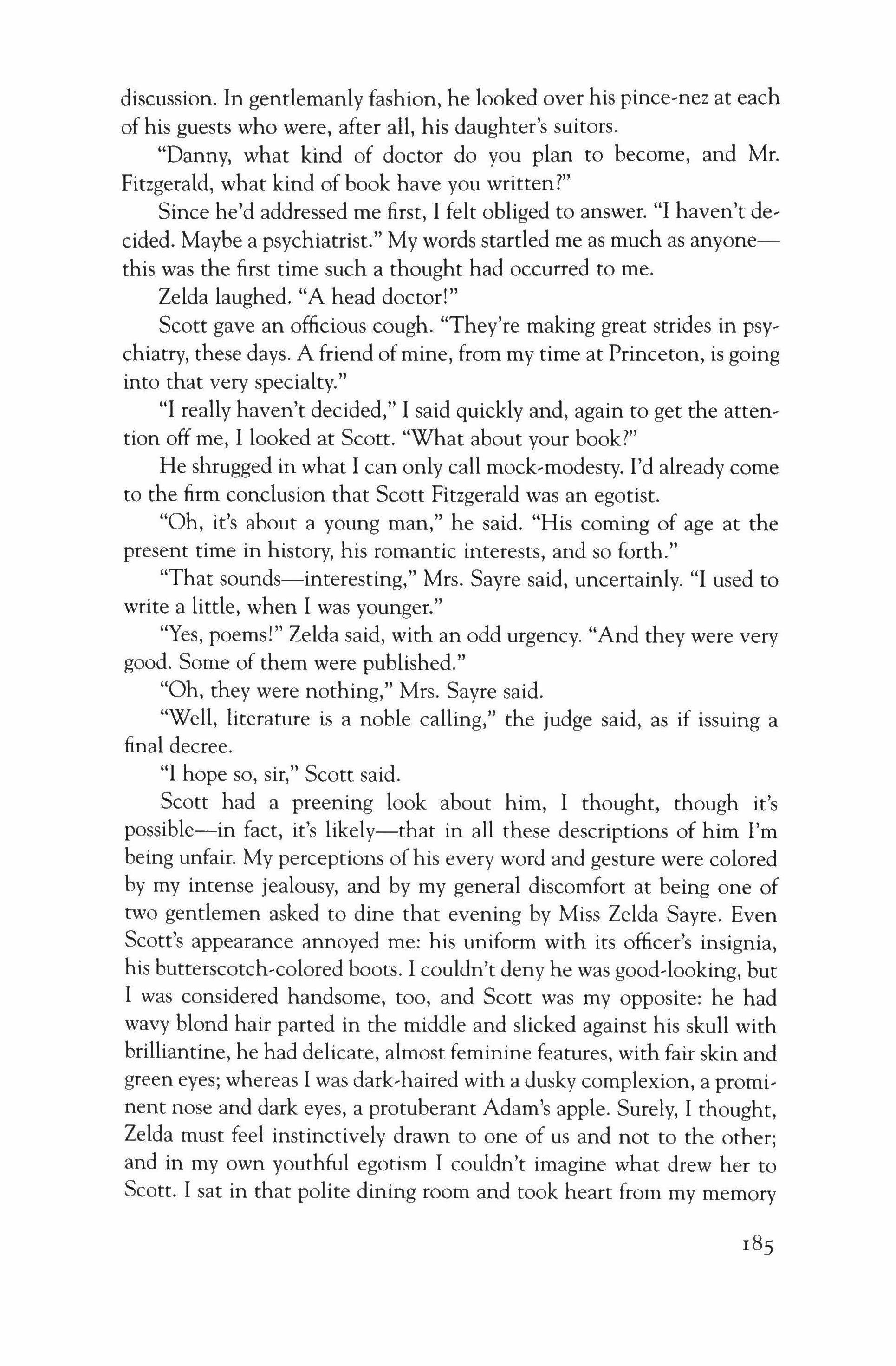
discussion. In gentlemanly fashion, he looked over his pince-nez at each of his guests who were, after all, his daughter's suitors.
"Danny, what kind of doctor do you plan to become, and Mr. Fitzgerald, what kind of book have you written?"
Since he'd addressed me first, I felt obliged to answer. "I haven't decided. Maybe a psychiatrist." My words startled me as much as anyonethis was the first time such a thought had occurred to me.
Zelda laughed. "A head doctor!"
Scott gave an officious cough. "They're making great strides in psychiatry, these days. A friend of mine, from my time at Princeton, is going into that very specialty."
"I really haven't decided," I said quickly and, again to get the attention off me, I looked at Scott. "What about your book?"
He shrugged in what I can only call mock-modesty. I'd already come to the firm conclusion that Scott Fitzgerald was an egotist.
"Oh, it's about a young man," he said. "His coming of age at the present time in history, his romantic interests, and so forth."
"That sounds-interesting," Mrs. Sayre said, uncertainly. "I used to write a little, when I was younger."
"Yes, poems!" Zelda said, with an odd urgency. "And they were very good. Some of them were published."
"Oh, they were nothing," Mrs. Sayre said.
"Well, literature is a noble calling," the judge said, as if issuing a final decree.
"I hope so, sir," Scott said.
Scott had a preening look about him, I thought, though it's possible-in fact, it's likely-that in all these descriptions of him I'm being unfair. My perceptions of his every word and gesture were colored by my intense jealousy, and by my general discomfort at being one of two gentlemen asked to dine that evening by Miss Zelda Sayre. Even Scott's appearance annoyed me: his uniform with its officer's insignia, his butterscotch-colored boots. I couldn't deny he was good-looking, but I was considered handsome, too, and Scott was my opposite: he had wavy blond hair parted in the middle and slicked against his skull with brilliantine, he had delicate, almost feminine features, with fair skin and green eyes; whereas I was dark-haired with a dusky complexion, a prominent nose and dark eyes, a protuberant Adam's apple. Surely, I thought, Zelda must feel instinctively drawn to one of us and not to the other; and in my own youthful egotism I couldn't imagine what drew her to Scott. I sat in that polite dining room and took heart from my memory
185
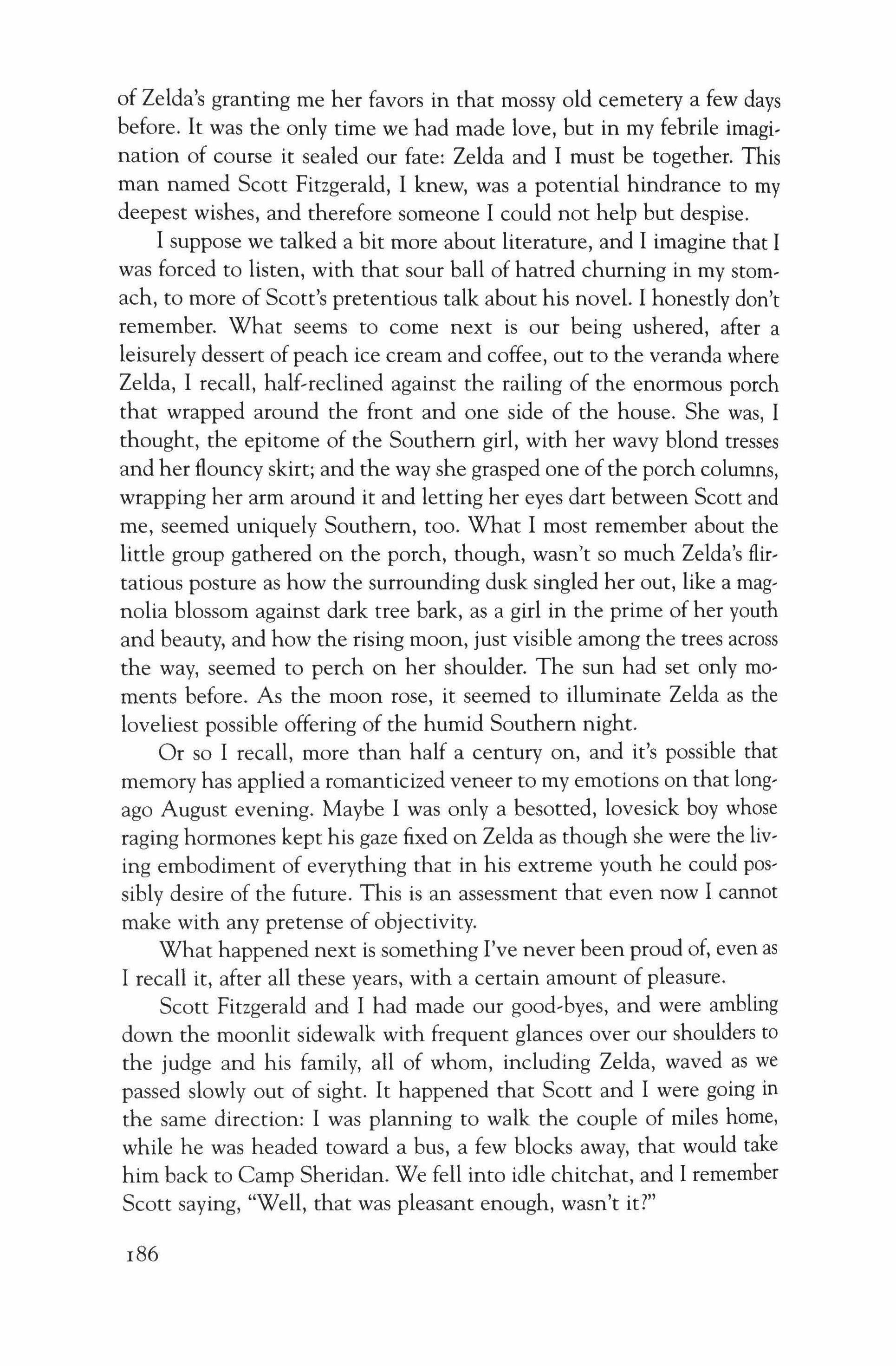
of Zelda's granting me her favors in that mossy old cemetery a few days before. It was the only time we had made love, but in my febrile imagination of course it sealed our fate: Zelda and I must be together. This man named Scott Fitzgerald, I knew, was a potential hindrance to my deepest wishes, and therefore someone I could not help but despise.
I suppose we talked a bit more about literature, and I imagine that I was forced to listen, with that sour ball of hatred churning in my stomach, to more of Scott's pretentious talk about his novel. I honestly don't remember. What seems to come next is our being ushered, after a leisurely dessert of peach ice cream and coffee, out to the veranda where Zelda, I recall, half-reclined against the railing of the enormous porch that wrapped around the front and one side of the house. She was, I thought, the epitome of the Southern girl, with her wavy blond tresses and her flouncy skirt; and the way she grasped one of the porch columns, wrapping her arm around it and letting her eyes dart between Scott and me, seemed uniquely Southern, too. What I most remember about the little group gathered on the porch, though, wasn't so much Zelda's flirtatious posture as how the surrounding dusk singled her out, like a magnolia blossom against dark tree bark, as a girl in the prime of her youth and beauty, and how the rising moon, just visible among the trees across the way, seemed to perch on her shoulder. The sun had set only moments before. As the moon rose, it seemed to illuminate Zelda as the loveliest possible offering of the humid Southern night.
Or so I recall, more than half a century on, and it's possible that memory has applied a romanticized veneer to my emotions on that longago August evening. Maybe I was only a besotted, lovesick boy whose raging hormones kept his gaze fixed on Zelda as though she were the living embodiment of everything that in his extreme youth he could possibly desire of the future. This is an assessment that even now I cannot make with any pretense of objectivity.
What happened next is something I've never been proud of, even as I recall it, after all these years, with a certain amount of pleasure.
Scott Fitzgerald and I had made our good-byes, and were ambling down the moonlit sidewalk with frequent glances over our shoulders to the judge and his family, all of whom, including Zelda, waved as we passed slowly out of sight. It happened that Scott and I were going in the same direction: I was planning to walk the couple of miles home, while he was headed toward a bus, a few blocks away, that would take him back to Camp Sheridan. We fell into idle chitchat, and I remember Scott saying, "Well, that was pleasant enough, wasn't it?"
186
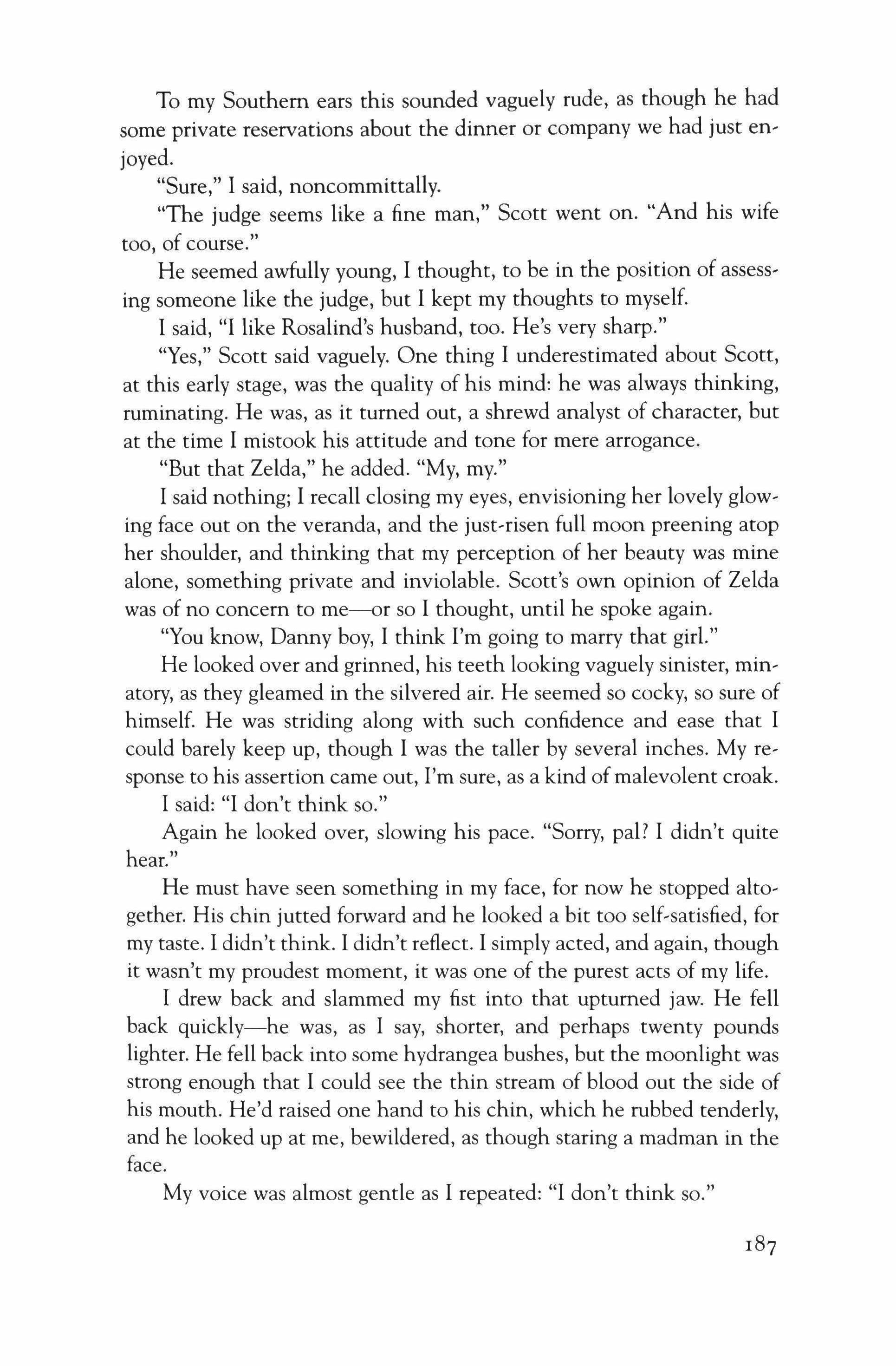
To my Southern ears this sounded vaguely rude, as though he had some private reservations about the dinner or company we had just en' joyed.
"Sure," I said, noncommittally.
"The judge seems like a fine man," Scott went on. "And his wife too, of course."
He seemed awfully young, I thought, to be in the position of assess, ing someone like the judge, but I kept my thoughts to myself.
I said, "I like Rosalind's husband, too. He's very sharp."
"Yes," Scott said vaguely. One thing I underestimated about Scott, at this early stage, was the quality of his mind: he was always thinking, ruminating. He was, as it turned out, a shrewd analyst of character, but at the time I mistook his attitude and tone for mere arrogance.
"But that Zelda," he added. "My, my."
I said nothing; I recall closing my eyes, envisioning her lovely glow, ing face out on the veranda, and the just-risen full moon preening atop her shoulder, and thinking that my perception of her beauty was mine alone, something private and inviolable. Scott's own opinion of Zelda was of no concern to me-or so I thought, until he spoke again.
"You know, Danny boy, I think I'm going to marry that girl."
He looked over and grinned, his teeth looking vaguely sinister, min' atory, as they gleamed in the silvered air. He seemed so cocky, so sure of himself. He was striding along with such confidence and ease that I could barely keep up, though I was the taller by several inches. My response to his assertion came out, I'm sure, as a kind of malevolent croak.
I said: "I don't think so."
Again he looked over, slowing his pace. "Sorry, pal? I didn't quite hear."
He must have seen something in my face, for now he stopped alto, gether. His chin jutted forward and he looked a bit too self-satisfied, for my taste. I didn't think. I didn't reflect. I simply acted, and again, though it wasn't my proudest moment, it was one of the purest acts of my life.
I drew back and slammed my fist into that upturned jaw. He fell back quickly-he was, as I say, shorter, and perhaps twenty pounds lighter. He fell back into some hydrangea bushes, but the moonlight was strong enough that I could see the thin stream of blood out the side of his mouth. He'd raised one hand to his chin, which he rubbed tenderly, and he looked up at me, bewildered, as though staring a madman in the face.
My voice was almost gentle as I repeated: "I don't think so."
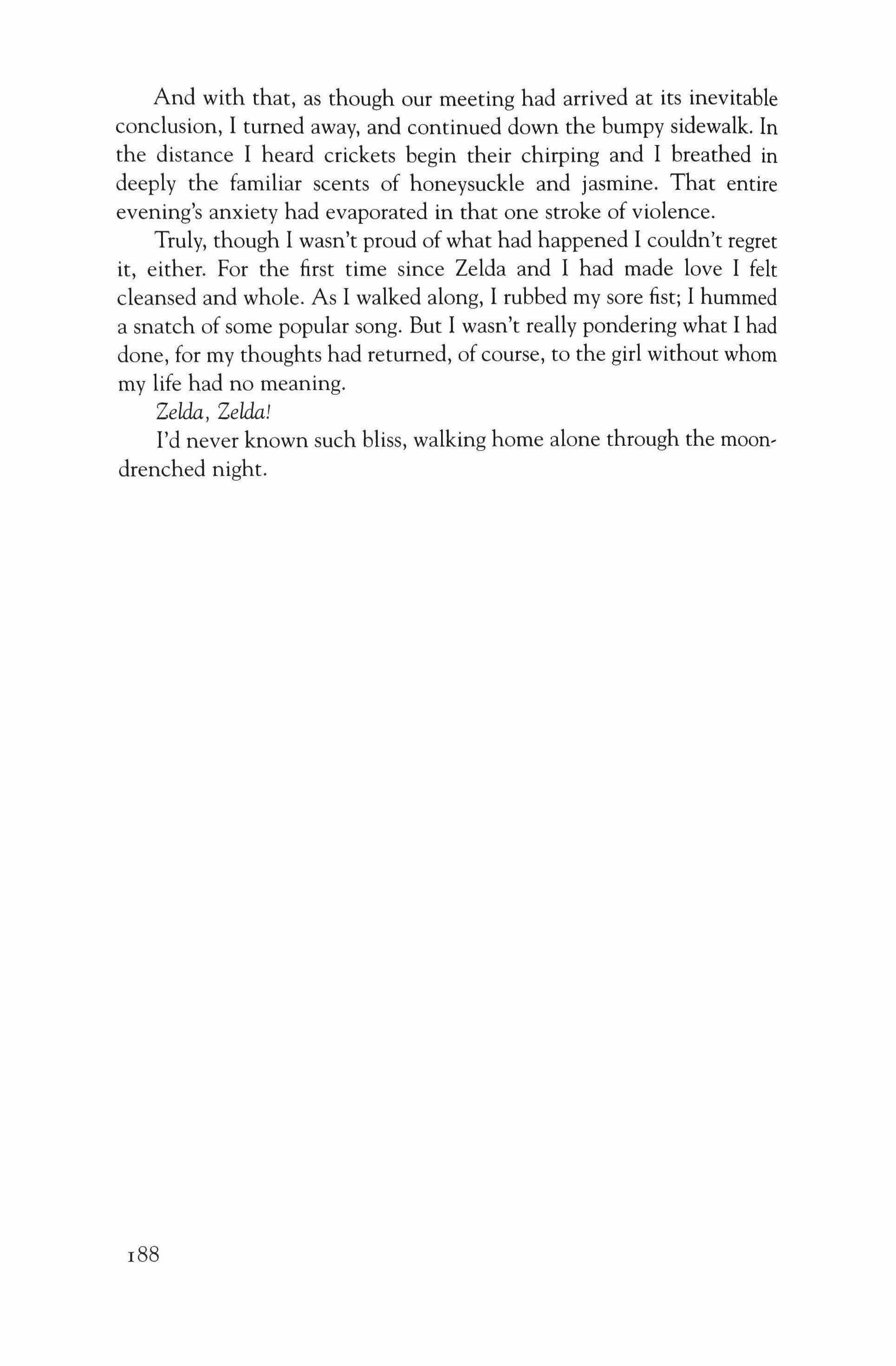
And with that, as though our meeting had arrived at its inevitable conclusion, I turned away, and continued down the bumpy sidewalk. In the distance I heard crickets begin their chirping and I breathed in deeply the familiar scents of honeysuckle and jasmine. That entire evening's anxiety had evaporated in that one stroke of violence.
Truly, though I wasn't proud of what had happened I couldn't regret it, either. For the first time since Zelda and I had made love I felt cleansed and whole. As I walked along, I rubbed my sore fist; I hummed a snatch of some popular song. But I wasn't really pondering what I had done, for my thoughts had returned, of course, to the girl without whom my life had no meaning.
Zelda, Zelda!
I'd never known such bliss, walking home alone through the moondrenched night.
188
David McDannald
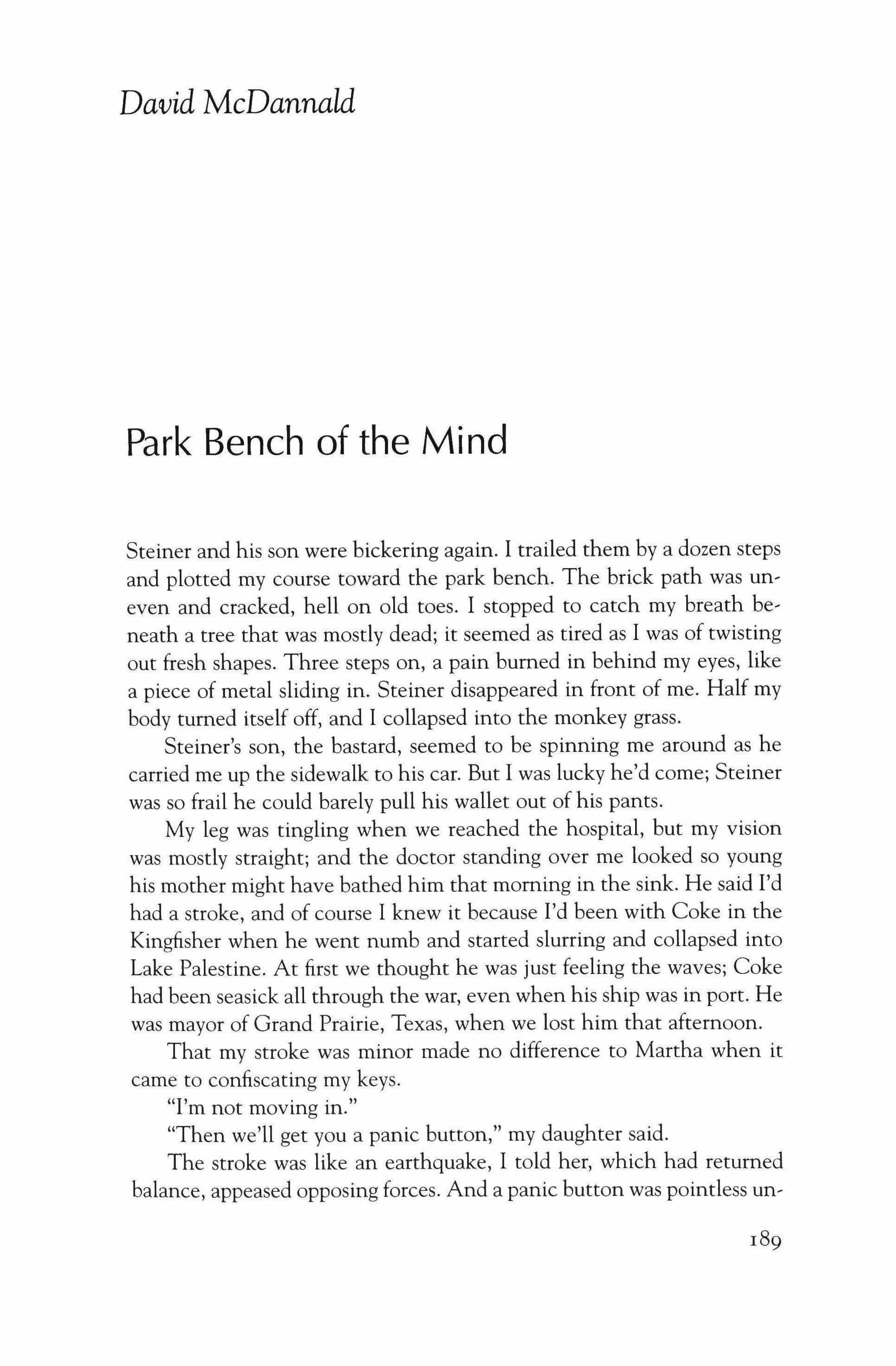
Park Bench of the Mind
Steiner and his son were bickering again. I trailed them by a dozen steps and plotted my course toward the park bench. The brick path was uneven and cracked, hell on old toes. I stopped to catch my breath beneath a tree that was mostly dead; it seemed as tired as I was of twisting out fresh shapes. Three steps on, a pain burned in behind my eyes, like a piece of metal sliding in. Steiner disappeared in front of me. Half my body turned itself off, and I collapsed into the monkey grass.
Steiner's son, the bastard, seemed to be spinning me around as he carried me up the sidewalk to his car. But I was lucky he'd come; Steiner was so frail he could barely pull his wallet out of his pants.
My leg was tingling when we reached the hospital, but my vision was mostly straight; and the doctor standing over me looked so young his mother might have bathed him that morning in the sink. He said I'd had a stroke, and of course I knew it because I'd been with Coke in the Kingfisher when he went numb and started slurring and collapsed into Lake Palestine. At first we thought he was just feeling the waves; Coke had been seasick all through the war, even when his ship was in port. He was mayor of Grand Prairie, Texas, when we lost him that afternoon.
That my stroke was minor made no difference to Martha when it came to confiscating my keys.
"I'm not moving in."
"Then we'll get you a panic button," my daughter said.
The stroke was like an earthquake, I told her, which had returned balance, appeased opposing forces. And a panic button was pointless un-
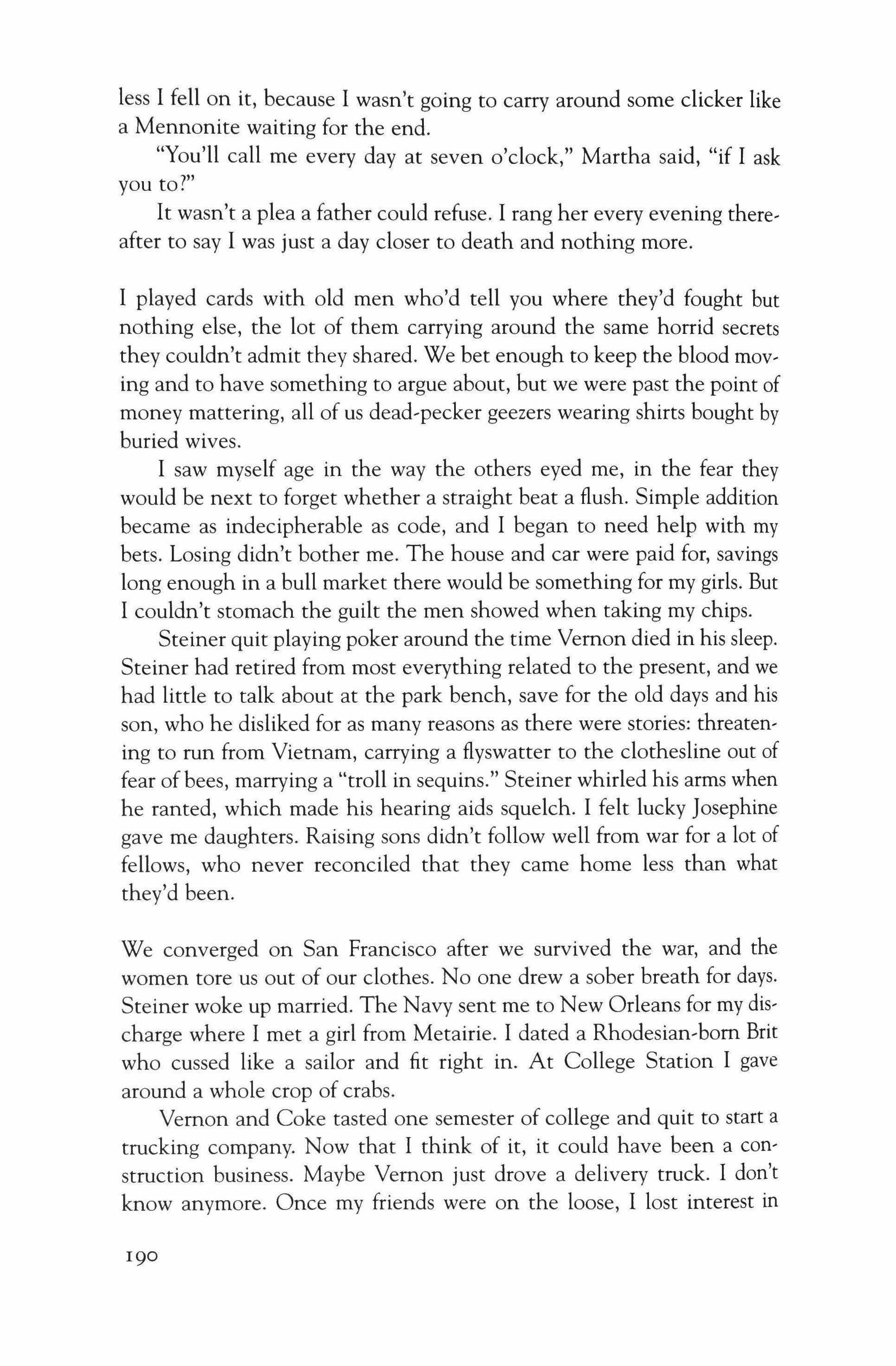
less I fell on it, because I wasn't going to carry around some clicker like a Mennonite waiting for the end.
"You'll call me every day at seven o'clock," Martha said, "if I ask you to?"
It wasn't a plea a father could refuse. I rang her every evening thereafter to say I was just a day closer to death and nothing more.
I played cards with old men who'd tell you where they'd fought but nothing else, the lot of them carrying around the same horrid secrets they couldn't admit they shared. We bet enough to keep the blood moving and to have something to argue about, but we were past the point of money mattering, all of us dead-peeker geezers wearing shirts bought by buried wives.
I saw myself age in the way the others eyed me, in the fear they would be next to forget whether a straight beat a flush. Simple addition became as indecipherable as code, and I began to need help with my bets. Losing didn't bother me. The house and car were paid for, savings long enough in a bull market there would be something for my girls. But I couldn't stomach the guilt the men showed when taking my chips.
Steiner quit playing poker around the time Vernon died in his sleep. Steiner had retired from most everything related to the present, and we had little to talk about at the park bench, save for the old days and his son, who he disliked for as many reasons as there were stories: threatening to run from Vietnam, carrying a flyswatter to the clothesline out of fear ofbees, marrying a "troll in sequins." Steiner whirled his arms when he ranted, which made his hearing aids squelch. I felt lucky Josephine gave me daughters. Raising sons didn't follow well from war for a lot of fellows, who never reconciled that they came home less than what they'd been.
We converged on San Francisco after we survived the war, and the women tore us out of our clothes. No one drew a sober breath for days. Steiner woke up married. The Navy sent me to New Orleans for my discharge where I met a girl from Metairie. I dated a Rhodesian-born Brit who cussed like a sailor and fit right in. At College Station I gave around a whole crop of crabs.
Vernon and Coke tasted one semester of college and quit to start a trucking company. Now that I think of it, it could have been a construction business. Maybe Vernon just drove a delivery truck. I don't know anymore. Once my friends were on the loose, I lost interest in
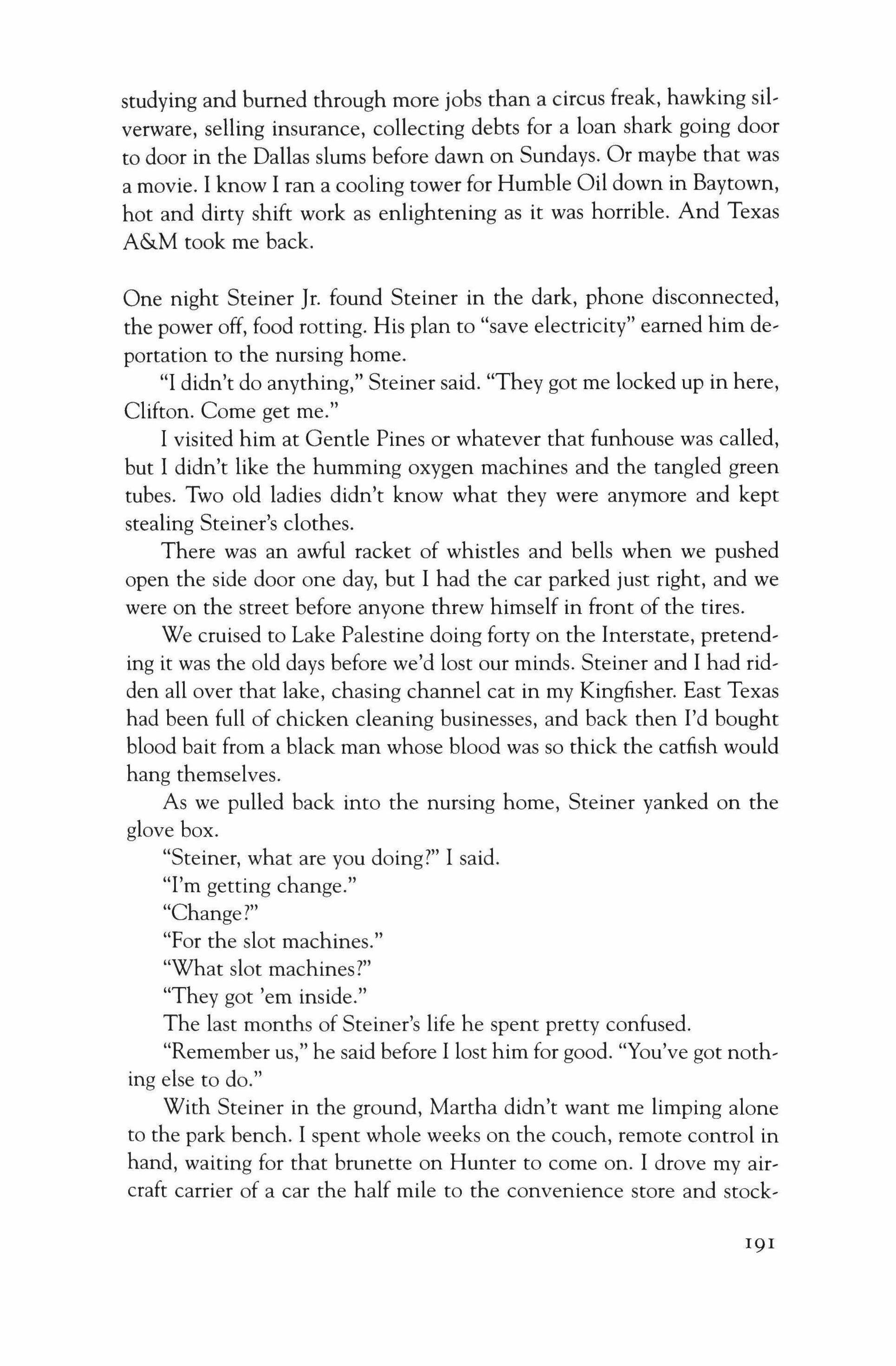
studying and burned through more jobs than a circus freak, hawking silverware, selling insurance, collecting debts for a loan shark going door to door in the Dallas slums before dawn on Sundays. Or maybe that was a movie. I know I ran a cooling tower for Humble Oil down in Baytown, hot and dirty shift work as enlightening as it was horrible. And Texas A&M took me back.
One night Steiner Jr. found Steiner in the dark, phone disconnected, the power off, food rotting. His plan to "save electricity" earned him deportation to the nursing horne.
"I didn't do anything," Steiner said. "They got me locked up in here, Clifton. Corne get me."
I visited him at Gentle Pines or whatever that funhouse was called, but I didn't like the humming oxygen machines and the tangled green tubes. Two old ladies didn't know what they were anymore and kept stealing Steiner's clothes.
There was an awful racket of whistles and bells when we pushed open the side door one day, but I had the car parked just right, and we were on the street before anyone threw himself in front of the tires.
We cruised to Lake Palestine doing forty on the Interstate, pretending it was the old days before we'd lost our minds. Steiner and I had ridden all over that lake, chasing channel cat in my Kingfisher. East Texas had been full of chicken cleaning businesses, and back then I'd bought blood bait from a black man whose blood was so thick the catfish would hang themselves.
As we pulled back into the nursing horne, Steiner yanked on the glove box.
"Steiner, what are you doing?" I said.
"I'm getting change." "Change?"
"For the slot machines."
"What slot machines?"
"They got 'ern inside."
The last months of Steiner's life he spent pretty confused.
"Remember us," he said before I lost him for good. "You've got nothing else to do."
With Steiner in the ground, Martha didn't want me limping alone to the park bench. I spent whole weeks on the couch, remote control in hand, waiting for that brunette on Hunter to corne on. I drove my aircraft carrier of a car the half mile to the convenience store and stock-
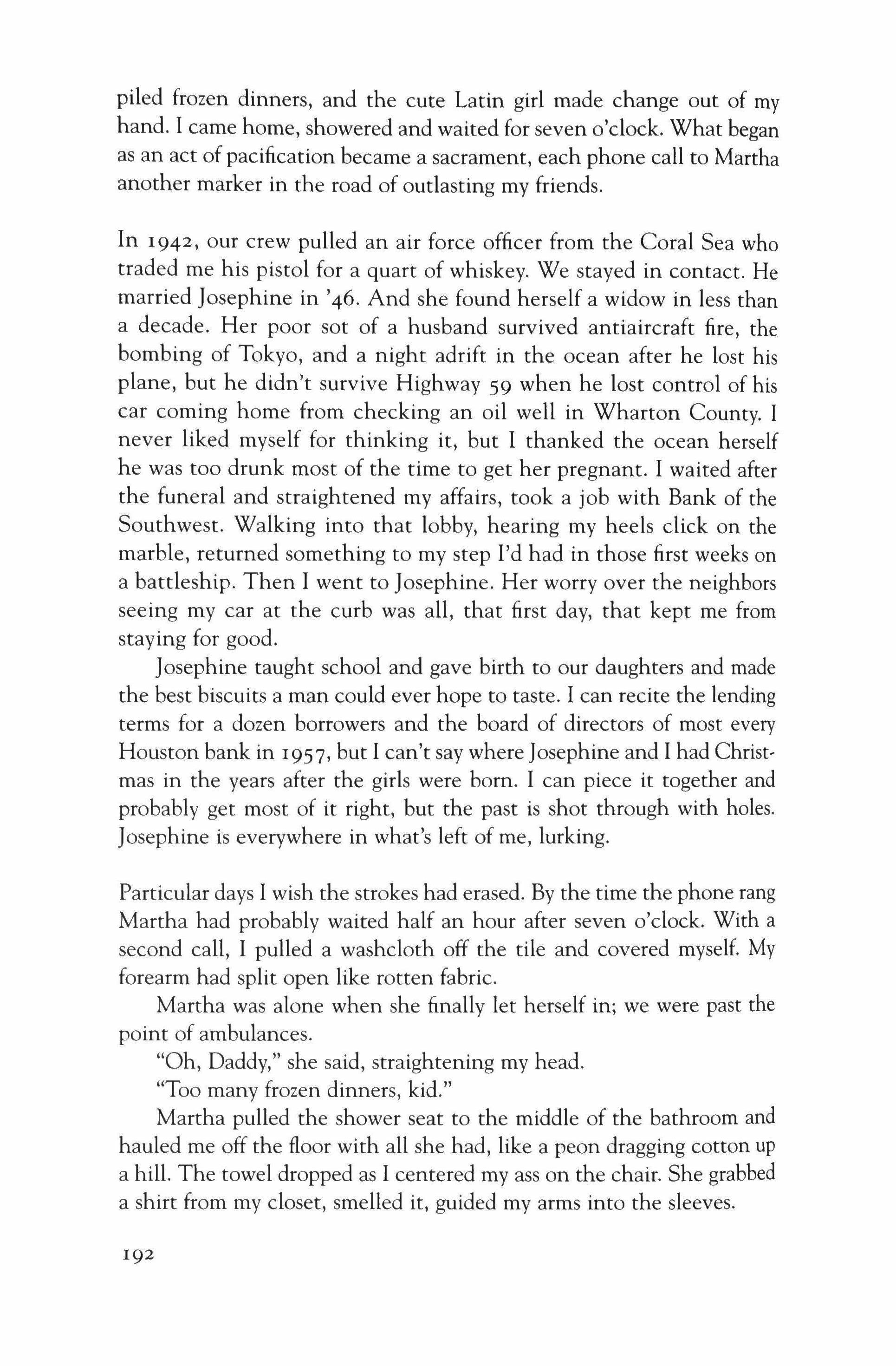
piled frozen dinners, and the cute Latin girl made change out of my hand. I came home, showered and waited for seven o'clock. What began as an act of pacification became a sacrament, each phone call to Martha another marker in the road of outlasting my friends.
In 1942, our crew pulled an air force officer from the Coral Sea who traded me his pistol for a quart of whiskey. We stayed in contact. He married Josephine in '46. And she found herself a widow in less than a decade. Her poor sot of a husband survived antiaircraft fire, the bombing of Tokyo, and a night adrift in the ocean after he lost his plane, but he didn't survive Highway 59 when he lost control of his car coming home from checking an oil well in Wharton County. I never liked myself for thinking it, but I thanked the ocean herself he was too drunk most of the time to get her pregnant. I waited after the funeral and straightened my affairs, took a job with Bank of the Southwest. Walking into that lobby, hearing my heels click on the marble, returned something to my step I'd had in those first weeks on a battleship. Then I went to Josephine. Her worry over the neighbors seeing my car at the curb was all, that first day, that kept me from staying for good.
Josephine taught school and gave birth to our daughters and made the best biscuits a man could ever hope to taste. I can recite the lending terms for a dozen borrowers and the board of directors of most every Houston bank in 1957, but I can't say where Josephine and I had Christmas in the years after the girls were born. I can piece it together and probably get most of it right, but the past is shot through with holes. Josephine is everywhere in what's left of me, lurking.
Particular days I wish the strokes had erased. By the time the phone rang Martha had probably waited half an hour after seven o'clock. With a second call, I pulled a washcloth off the tile and covered myself. My forearm had split open like rotten fabric.
Martha was alone when she finally let herself in; we were past the point of ambulances.
"Oh, Daddy," she said, straightening my head.
"Too many frozen dinners, kid."
Martha pulled the shower seat to the middle of the bathroom and hauled me off the floor with all she had, like a peon dragging cotton up a hill. The towel dropped as I centered my ass on the chair. She grabbed a shirt from my closet, smelled it, guided my arms into the sleeves.
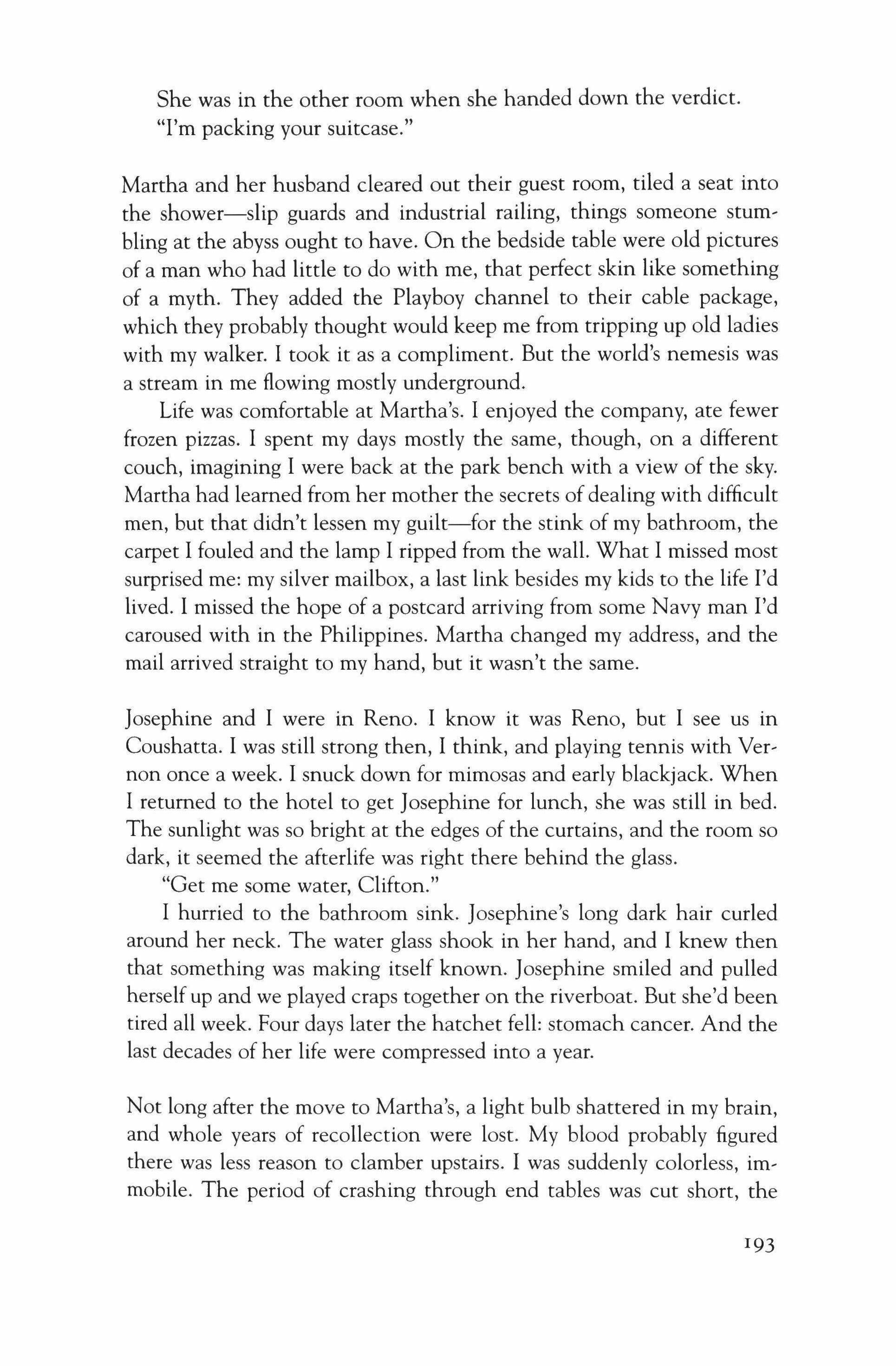
She was in the other room when she handed down the verdict.
"I'm packing your suitcase."
Martha and her husband cleared out their guest room, tiled a seat into the shower-slip guards and industrial railing, things someone stumbling at the abyss ought to have. On the bedside table were old pictures of a man who had little to do with me, that perfect skin like something of a myth. They added the Playboy channel to their cable package, which they probably thought would keep me from tripping up old ladies with my walker. I took it as a compliment. But the world's nemesis was a stream in me
flowing mostly underground.
Life was comfortable at Martha's. I enjoyed the company, ate fewer frozen pizzas. I spent my days mostly the same, though, on a different couch, imagining I were back at the park bench with a view of the sky. Martha had learned from her mother the secrets of dealing with difficult men, but that didn't lessen my guilt-for the stink of my bathroom, the carpet I fouled and the lamp I ripped from the wall. What I missed most surprised me: my silver mailbox, a last link besides my kids to the life I'd lived. I missed the hope of a postcard arriving from some Navy man I'd caroused with in the Philippines. Martha changed my address, and the mail arrived straight to my hand, but it wasn't the same.
Josephine and I were in Reno. I know it was Reno, but I see us in Coushatta. I was still strong then, I think, and playing tennis with Vernon once a week. I snuck down for mimosas and early blackjack. When I returned to the hotel to get Josephine for lunch, she was still in bed. The sunlight was so bright at the edges of the curtains, and the room so dark, it seemed the afterlife was right there behind the glass.
"Get me some water, Clifton."
I hurried to the bathroom sink. Josephine's long dark hair curled around her neck. The water glass shook in her hand, and I knew then that something was making itself known. Josephine smiled and pulled herself up and we played craps together on the riverboat. But she'd been tired all week. Four days later the hatchet fell: stomach cancer. And the last decades of her life were compressed into a year.
Not long after the move to Martha's, a light bulb shattered in my brain, and whole years of recollection were lost. My blood probably figured there was less reason to clamber upstairs. I was suddenly colorless, immobile. The period of crashing through end tables was cut short, the
193
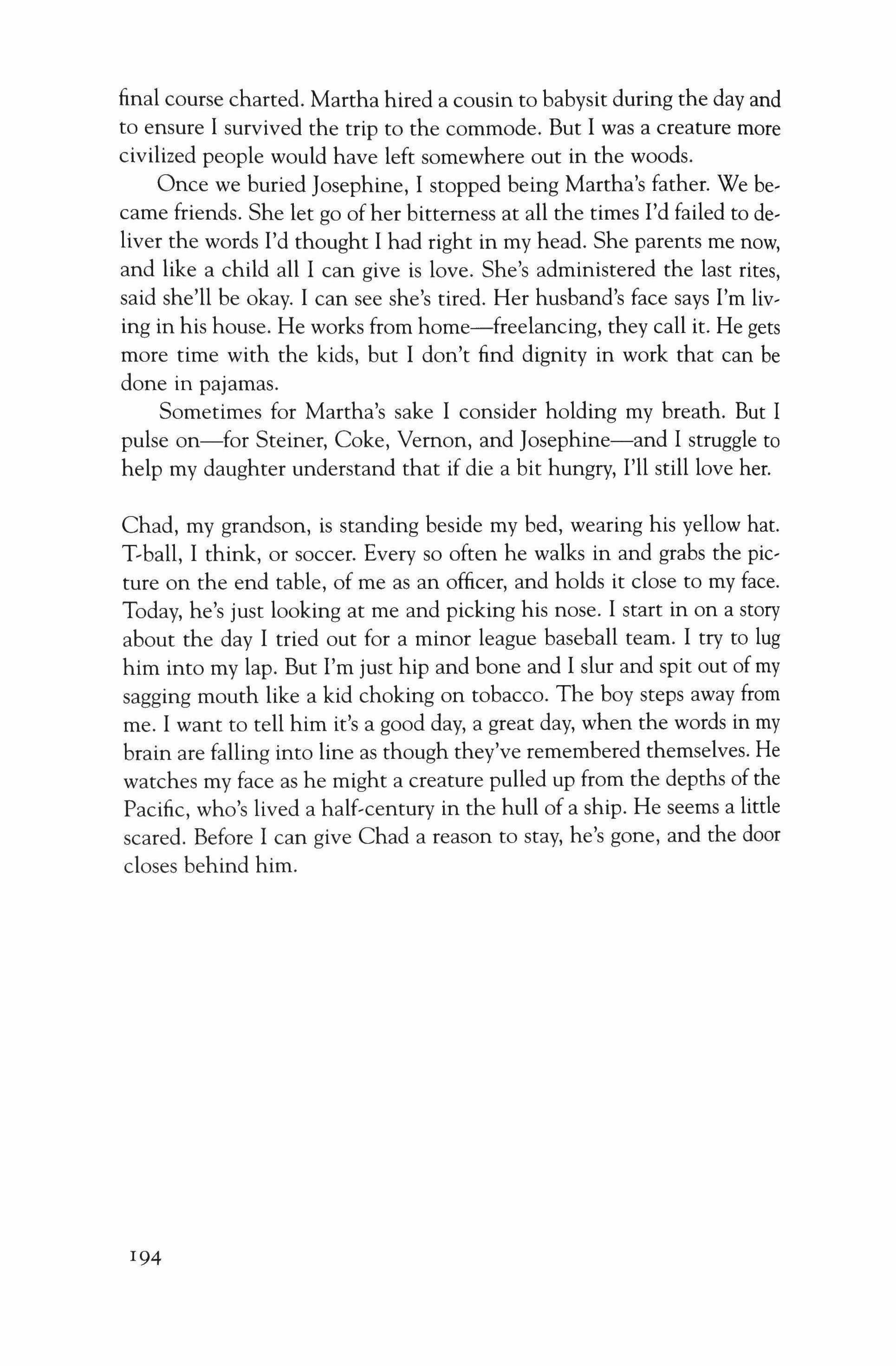
final course charted. Martha hired a cousin to babysit during the day and to ensure I survived the trip to the commode. But I was a creature more civilized people would have left somewhere out in the woods.
Once we buried Josephine, I stopped being Martha's father. We became friends. She let go of her bitterness at all the times I'd failed to deliver the words I'd thought I had right in my head. She parents me now, and like a child all I can give is love. She's administered the last rites, said she'll be okay. I can see she's tired. Her husband's face says I'm living in his house. He works from home-freelancing, they call it. He gets more time with the kids, but I don't find dignity in work that can be done in pajamas.
Sometimes for Martha's sake I consider holding my breath. But I pulse on-for Steiner, Coke, Vernon, and Josephine-and I struggle to help my daughter understand that if die a bit hungry, I'll still love her.
Chad, my grandson, is standing beside my bed, wearing his yellow hat. Tball, I think, or soccer. Every so often he walks in and grabs the picture on the end table, of me as an officer, and holds it close to my face. Today, he's just looking at me and picking his nose. I start in on a story about the day I tried out for a minor league baseball team. I try to lug him into my lap. But I'm just hip and bone and I slur and spit out of my sagging mouth like a kid choking on tobacco. The boy steps away from me. I want to tell him it's a good day, a great day, when the words in my brain are falling into line as though they've remembered themselves. He watches my face as he might a creature pulled up from the depths of the Pacific, who's lived a half-century in the hull of a ship. He seems a little scared. Before I can give Chad a reason to stay, he's gone, and the door closes behind him.
I94
Colin Fleming
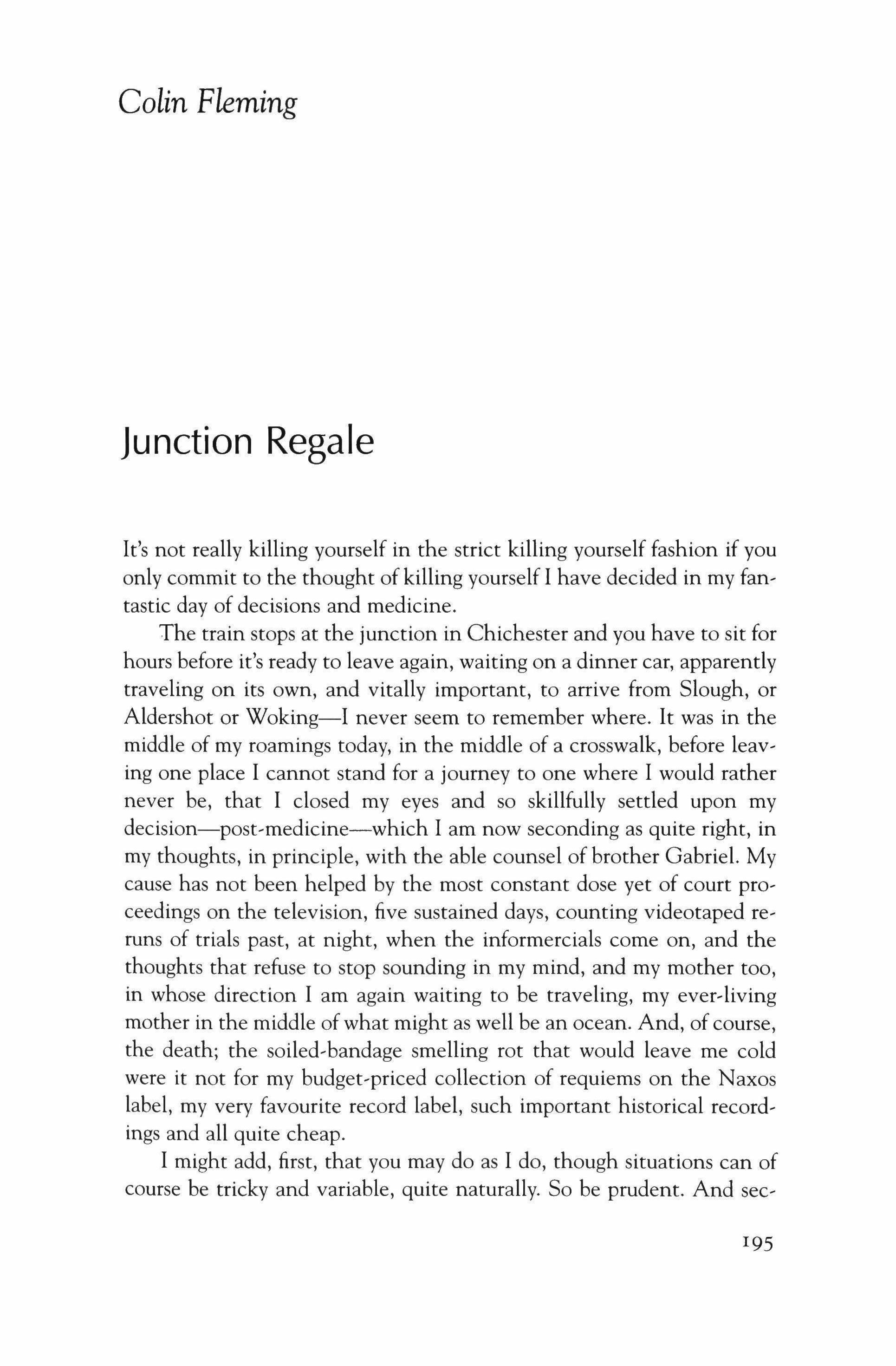
Junction Regale
It's not really killing yourself in the strict killing yourself fashion if you only commit to the thought of killing yourself I have decided in my fantastic day of decisions and medicine.
The train stops at the junction in Chichester and you have to sit for hours before it's ready to leave again, waiting on a dinner car, apparently traveling on its own, and vitally important, to arrive from Slough, or Aldershot or Woking-I never seem to remember where. It was in the middle of my roamings today, in the middle of a crosswalk, before leaving one place I cannot stand for a journey to one where I would rather never be, that I closed my eyes and so skillfully settled upon my decision-post�medicine-which I am now seconding as quite right, in my thoughts, in principle, with the able counsel of brother Gabriel. My cause has not been helped by the most constant dose yet of court proceedings on the television, five sustained days, counting videotaped reruns of trials past, at night, when the informercials come on, and the thoughts that refuse to stop sounding in my mind, and my mother too, in whose direction I am again waiting to be traveling, my ever-living mother in the middle ofwhat might as well be an ocean. And, of course, the death; the soiled-bandage smelling rot that would leave me cold were it not for my budget-priced collection of requiems on the Naxos label, my very favourite record label, such important historical recordings and all quite cheap.
I might add, first, that you may do as I do, though situations can of course be tricky and variable, quite naturally. So be prudent. And sec-
I95
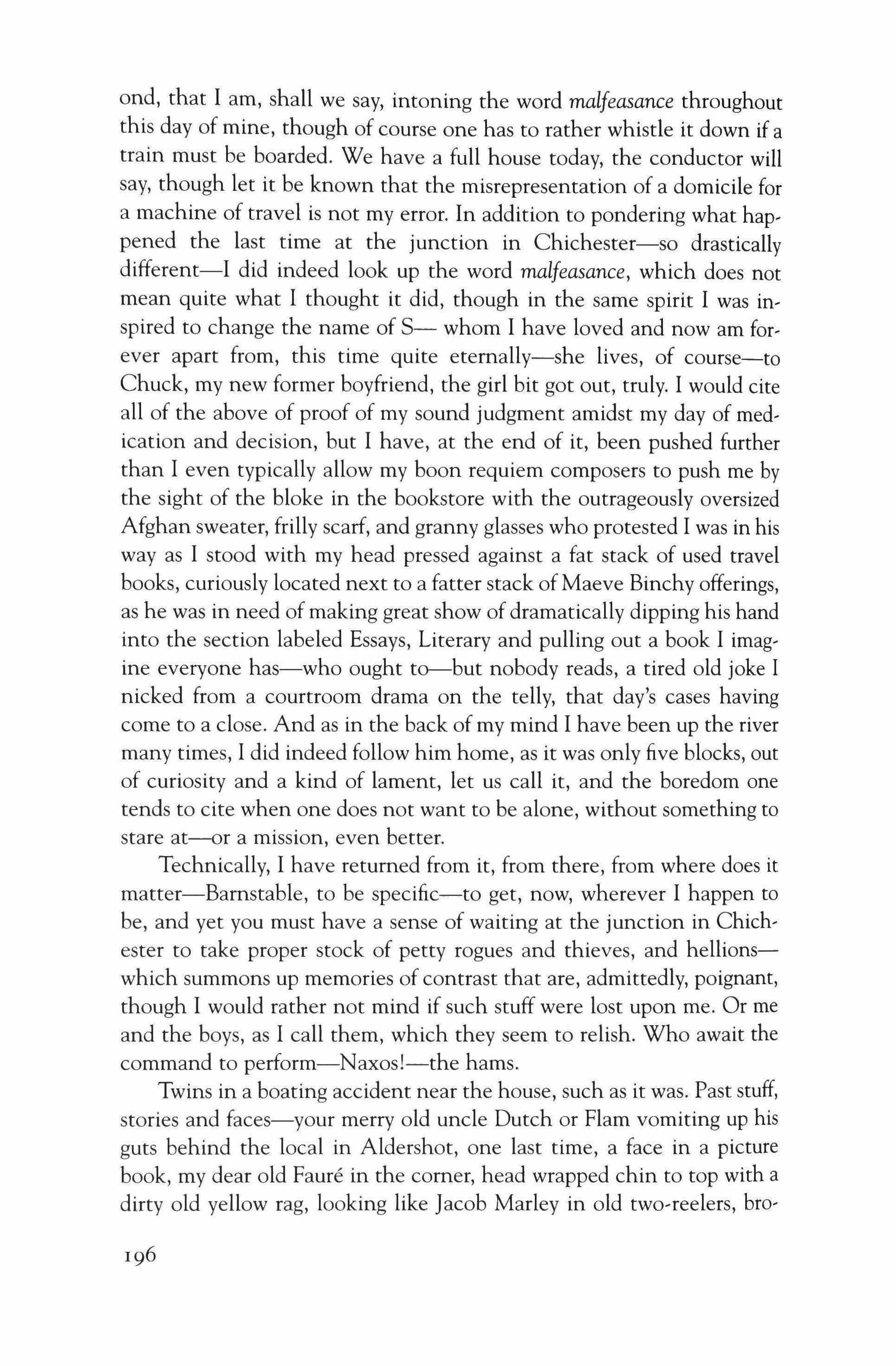
ond, that I am, shall we say, intoning the word malfeasance throughout this day of mine, though of course one has to rather whistle it down if a train must be boarded. We have a full house today, the conductor will say, though let it be known that the misrepresentation of a domicile for a machine of travel is not my error. In addition to pondering what happened the last time at the junction in Chichester-so drastically different-I did indeed look up the word malfeasance, which does not mean quite what I thought it did, though in the same spirit I was inspired to change the name of S- whom I have loved and now am forever apart from, this time quite eternally-she lives, of course-to Chuck, my new former boyfriend, the girl bit got out, truly. I would cite all of the above of proof of my sound judgment amidst my day of medication and decision, but I have, at the end of it, been pushed further than I even typically allow my boon requiem composers to push me by the sight of the bloke in the bookstore with the outrageously oversized Afghan sweater, frilly scarf, and granny glasses who protested I was in his way as I stood with my head pressed against a fat stack of used travel books, curiously located next to a fatter stack of Maeve Binchy offerings, as he was in need of making great show of dramatically dipping his hand into the section labeled Essays, Literary and pulling out a book I imagine everyone has-who ought to-but nobody reads, a tired old joke I nicked from a courtroom drama on the telly, that day's cases having come to a close. And as in the back of my mind I have been up the river many times, I did indeed follow him home, as it was only five blocks, out of curiosity and a kind of lament, let us call it, and the boredom one tends to cite when one does not want to be alone, without something to stare at-or a mission, even better.
Technically, I have returned from it, from there, from where does it matter-Barnstable, to be specific-to get, now, wherever I happen to be, and yet you must have a sense of waiting at the junction in Chichester to take proper stock of petty rogues and thieves, and hellionswhich summons up memories of contrast that are, admittedly, poignant, though I would rather not mind if such stuff were lost upon me. Or me and the boys, as I call them, which they seem to relish. Who await the command to perform-Naxos!-the hams.
Twins in a boating accident near the house, such as it was. Past stuff, stories and faces-your merry old uncle Dutch or Flam vomiting up his guts behind the local in Aldershot, one last time, a face in a picture book, my dear old Faure in the comer, head wrapped chin to top with a dirty old yellow rag, looking like Jacob Marley in old two-reelers, bro-
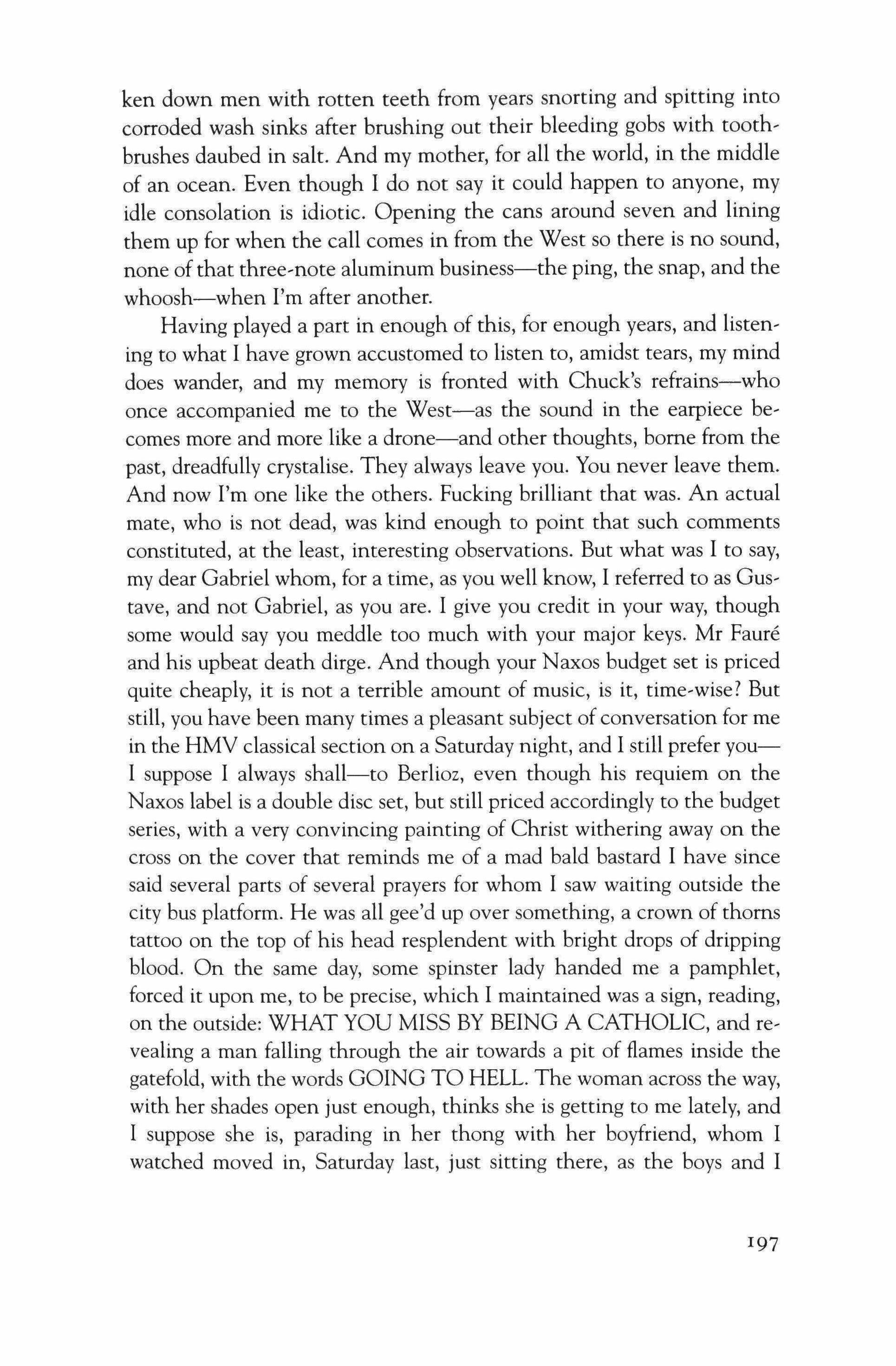
ken down men with rotten teeth from years snorting and spitting into corroded wash sinks after brushing out their bleeding gobs with toothbrushes daubed in salt. And my mother, for all the world, in the middle of an ocean. Even though I do not say it could happen to anyone, my idle consolation is idiotic. Opening the cans around seven and lining them up for when the call comes in from the West so there is no sound, none ofthat three-note aluminum business-the ping, the snap, and the whoosh-when I'm after another.
Having played a part in enough of this, for enough years, and listening to what I have grown accustomed to listen to, amidst tears, my mind does wander, and my memory is fronted with Chuck's refrains-who once accompanied me to the West-as the sound in the earpiece becomes more and more like a drone-and other thoughts, borne from the past, dreadfully crystalise. They always leave you. You never leave them. And now I'm one like the others. Fucking brilliant that was. An actual mate, who is not dead, was kind enough to point that such comments constituted, at the least, interesting observations. But what was I to say, my dear Gabriel whom, for a time, as you well know, I referred to as Gustave, and not Gabriel, as you are. I give you credit in your way, though some would say you meddle too much with your major keys. Mr Faure and his upbeat death dirge. And though your Naxos budget set is priced quite cheaply, it is not a terrible amount of music, is it, time-wise? But still, you have been many times a pleasant subject of conversation for me in the HMV classical section on a Saturday night, and I still prefer youI suppose I always shall-to Berlioz, even though his requiem on the Naxos label is a double disc set, but still priced accordingly to the budget series, with a very convincing painting of Christ withering away on the cross on the cover that reminds me of a mad bald bastard I have since said several parts of several prayers for whom I saw waiting outside the city bus platform. He was all gee'd up over something, a crown of thorns tattoo on the top of his head resplendent with bright drops of dripping blood. On the same day, some spinster lady handed me a pamphlet, forced it upon me, to be precise, which I maintained was a sign, reading, on the outside: WHAT YOU MISS BY BEING A CATHOLIC, and revealing a man falling through the air towards a pit of flames inside the gatefold, with the words GOING TO HELL. The woman across the way, with her shades open just enough, thinks she is getting to me lately, and I suppose she is, parading in her thong with her boyfriend, whom I watched moved in, Saturday last, just sitting there, as the boys and I
197
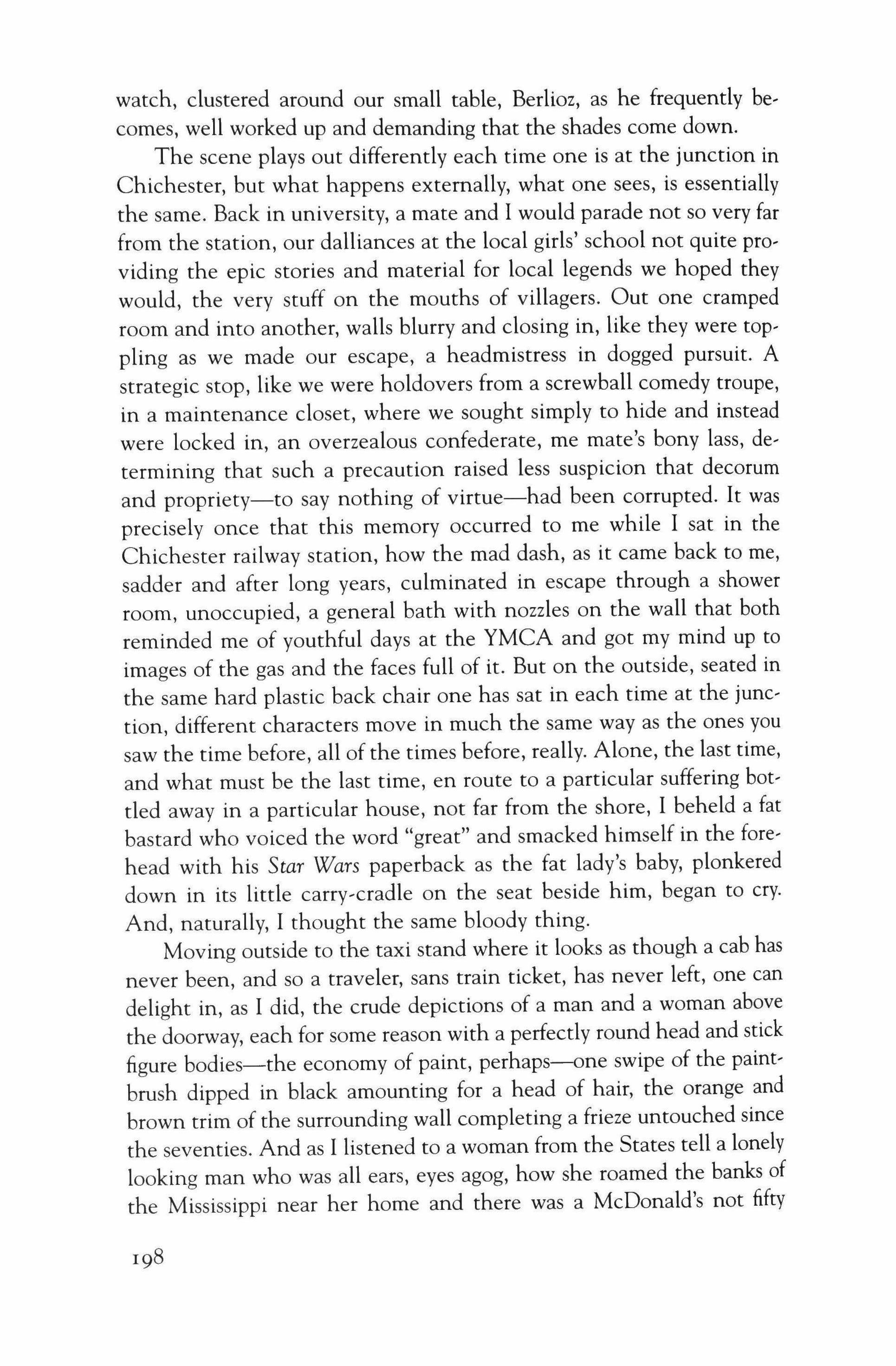
watch, clustered around our small table, Berlioz, as he frequently becomes, well worked up and demanding that the shades come down.
The scene plays out differently each time one is at the junction in Chichester, but what happens externally, what one sees, is essentially the same. Back in university, a mate and I would parade not so very far from the station, our dalliances at the local girls' school not quite providing the epic stories and material for local legends we hoped they would, the very stuff on the mouths of villagers. Out one cramped room and into another, walls blurry and closing in, like they were toppling as we made our escape, a headmistress in dogged pursuit. A strategic stop, like we were holdovers from a screwball comedy troupe, in a maintenance closet, where we sought simply to hide and instead were locked in, an overzealous confederate, me mate's bony lass, determining that such a precaution raised less suspicion that decorum and propriety-to say nothing of virtue-had been corrupted. It was precisely once that this memory occurred to me while I sat in the Chichester railway station, how the mad dash, as it came back to me, sadder and after long years, culminated in escape through a shower room, unoccupied, a general bath with nozzles on the wall that both reminded me of youthful days at the YMCA and got my mind up to images of the gas and the faces full of it. But on the outside, seated in the same hard plastic back chair one has sat in each time at the junction, different characters move in much the same way as the ones you saw the time before, all of the times before, really. Alone, the last time, and what must be the last time, en route to a particular suffering bottled away in a particular house, not far from the shore, I beheld a fat bastard who voiced the word "great" and smacked himself in the forehead with his Star Wars paperback as the fat lady's baby, plonkered down in its little carry-cradle on the seat beside him, began to cry.
And, naturally, I thought the same bloody thing.
Moving outside to the taxi stand where it looks as though a cab has never been, and so a traveler, sans train ticket, has never left, one can delight in, as I did, the crude depictions of a man and a woman above the doorway, each for some reason with a perfectly round head and stick figure bodies-the economy of paint, perhaps-one swipe of the paintbrush dipped in black amounting for a head of hair, the orange and brown trim of the surrounding wall completing a frieze untouched since the seventies. And as I listened to a woman from the States tell a lonely looking man who was all ears, eyes agog, how she roamed the banks of the Mississippi near her home and there was a McDonald's not fifty
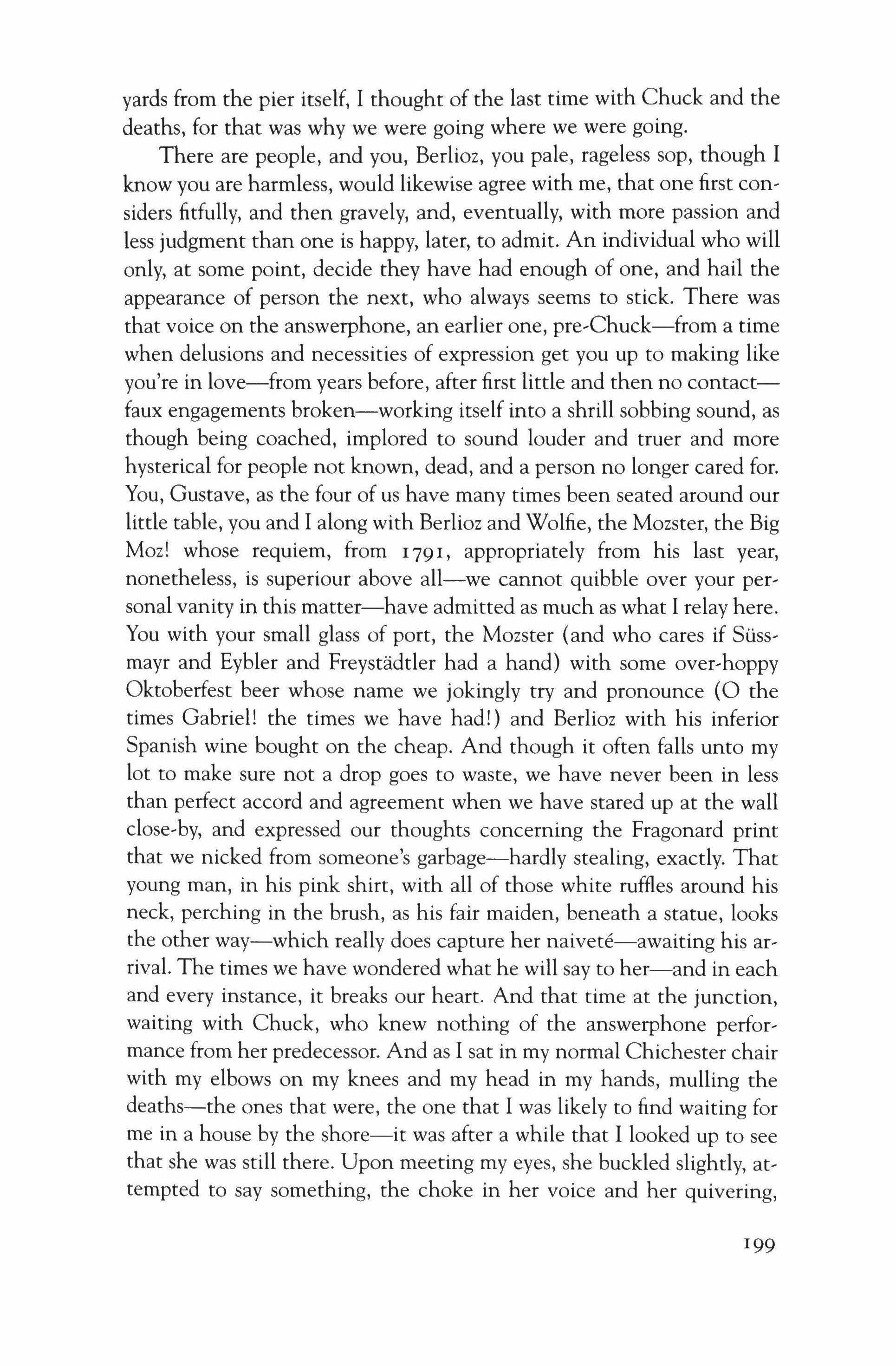
yards from the pier itself, I thought of the last time with Chuck and the deaths, for that was why we were going where we were going.
There are people, and you, Berlioz, you pale, rageless sop, though I know you are harmless, would likewise agree with me, that one first considers fitfully, and then gravely, and, eventually, with more passion and less judgment than one is happy, later, to admit. An individual who will only, at some point, decide they have had enough of one, and hail the appearance of person the next, who always seems to stick. There was that voice on the answerphone, an earlier one, pre-Chuck-from a time when delusions and necessities of expression get you up to making like you're in love-from years before, after first little and then no contactfaux engagements broken-working itself into a shrill sobbing sound, as though being coached, implored to sound louder and truer and more hysterical for people not known, dead, and a person no longer cared for. You, Gustave, as the four of us have many times been seated around our little table, you and I along with Berlioz and Wolfie, the Mozster, the Big Moz! whose requiem, from 1791, appropriately from his last year, nonetheless, is superiour above all-we cannot quibble over your personal vanity in this matter-have admitted as much as what I relay here. You with your small glass of port, the Mozster (and who cares if Sussmayr and Eybler and Freystadtler had a hand) with some over-hoppy Oktoberfest beer whose name we jokingly try and pronounce (O the times Gabriel! the times we have had!) and Berlioz with his inferior Spanish wine bought on the cheap. And though it often falls unto my lot to make sure not a drop goes to waste, we have never been in less than perfect accord and agreement when we have stared up at the wall close-by, and expressed our thoughts concerning the Fragonard print that we nicked from someone's garbage-hardly stealing, exactly. That young man, in his pink shirt, with all of those white ruffles around his neck, perching in the brush, as his fair maiden, beneath a statue, looks the other way-which really does capture her naivete-awaiting his arrival. The times we have wondered what he will say to her-and in each and every instance, it breaks our heart. And that time at the junction, waiting with Chuck, who knew nothing of the answerphone performance from her predecessor. And as I sat in my normal Chichester chair with my elbows on my knees and my head in my hands, mulling the deaths-the ones that were, the one that I was likely to find waiting for me in a house by the shore-it was after a while that I looked up to see that she was still there. Upon meeting my eyes, she buckled slightly, attempted to say something, the choke in her voice and her quivering,
199
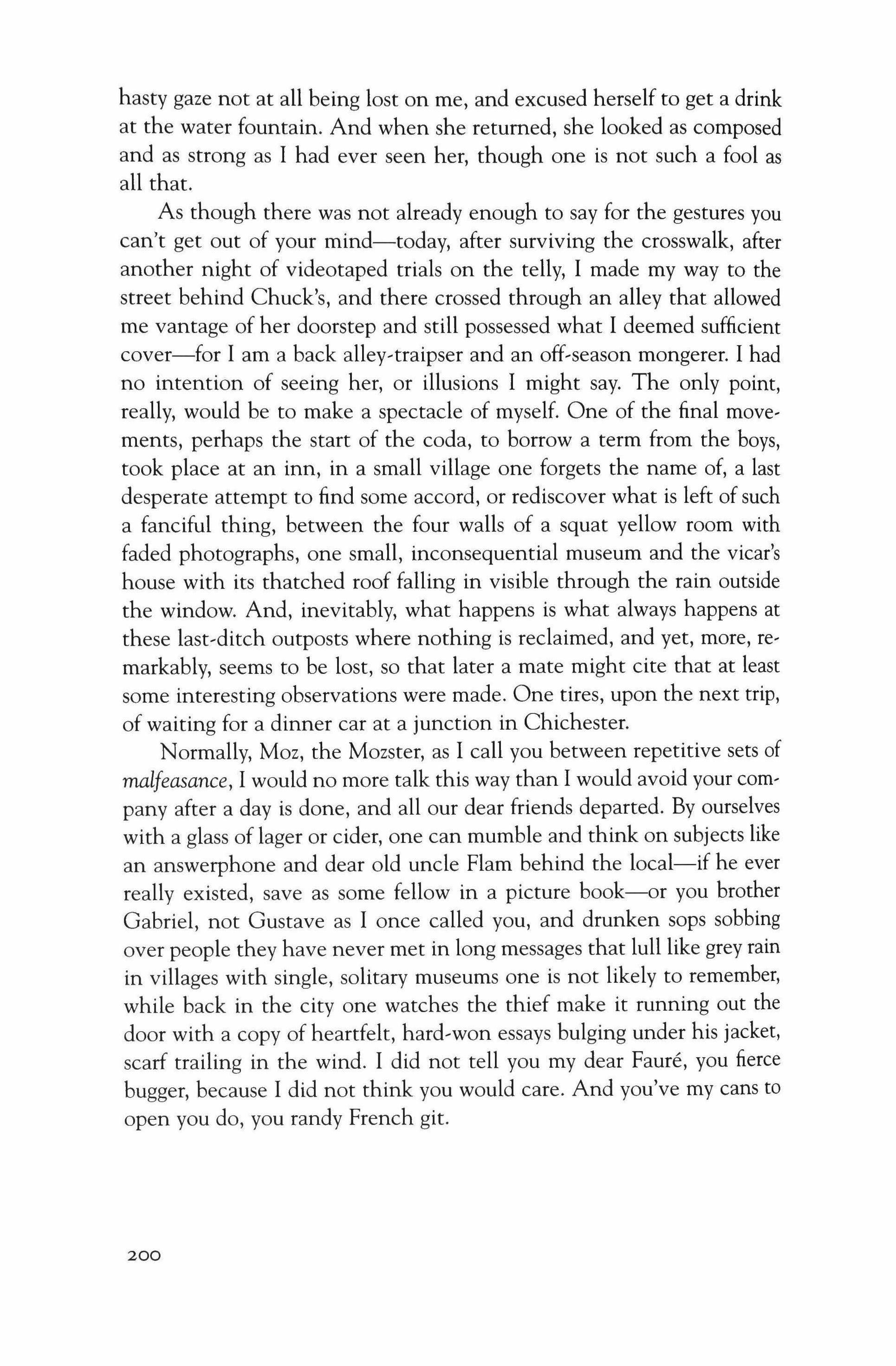
hasty gaze not at all being lost on me, and excused herself to get a drink at the water fountain. And when she returned, she looked as composed and as strong as I had ever seen her, though one is not such a fool as all that.
As though there was not already enough to say for the gestures you can't get out of your mind-today, after surviving the crosswalk, after another night of videotaped trials on the telly, I made my way to the street behind Chuck's, and there crossed through an alley that allowed me vantage of her doorstep and still possessed what I deemed sufficient cover-for I am a back alley-traipser and an off-season mongerer. I had no intention of seeing her, or illusions I might say. The only point, really, would be to make a spectacle of myself. One of the final movements, perhaps the start of the coda, to borrow a term from the boys, took place at an inn, in a small village one forgets the name of, a last desperate attempt to find some accord, or rediscover what is left of such a fanciful thing, between the four walls of a squat yellow room with faded photographs, one small, inconsequential museum and the vicar's house with its thatched roof falling in visible through the rain outside the window. And, inevitably, what happens is what always happens at these last-ditch outposts where nothing is reclaimed, and yet, more, remarkably, seems to be lost, so that later a mate might cite that at least some interesting observations were made. One tires, upon the next trip, of waiting for a dinner car at a junction in Chichester.
Normally, Moz, the Mozster, as I call you between repetitive sets of malfeasance, I would no more talk this way than I would avoid your company after a day is done, and all our dear friends departed. By ourselves with a glass of lager or cider, one can mumble and think on subjects like an answerphone and dear old uncle Flam behind the local-if he ever really existed, save as some fellow in a picture book-or you brother Gabriel, not Gustave as lance called you, and drunken sops sobbing over people they have never met in long messages that lull like grey rain in villages with single, solitary museums one is not likely to remember, while back in the city one watches the thief make it running out the door with a copy of heartfelt, hard-won essays bulging under his jacket, scarf trailing in the wind. I did not tell you my dear Faure, you fierce bugger, because I did not think you would care. And you've my cans to open you do, you randy French git.
200
Fred Skolnik
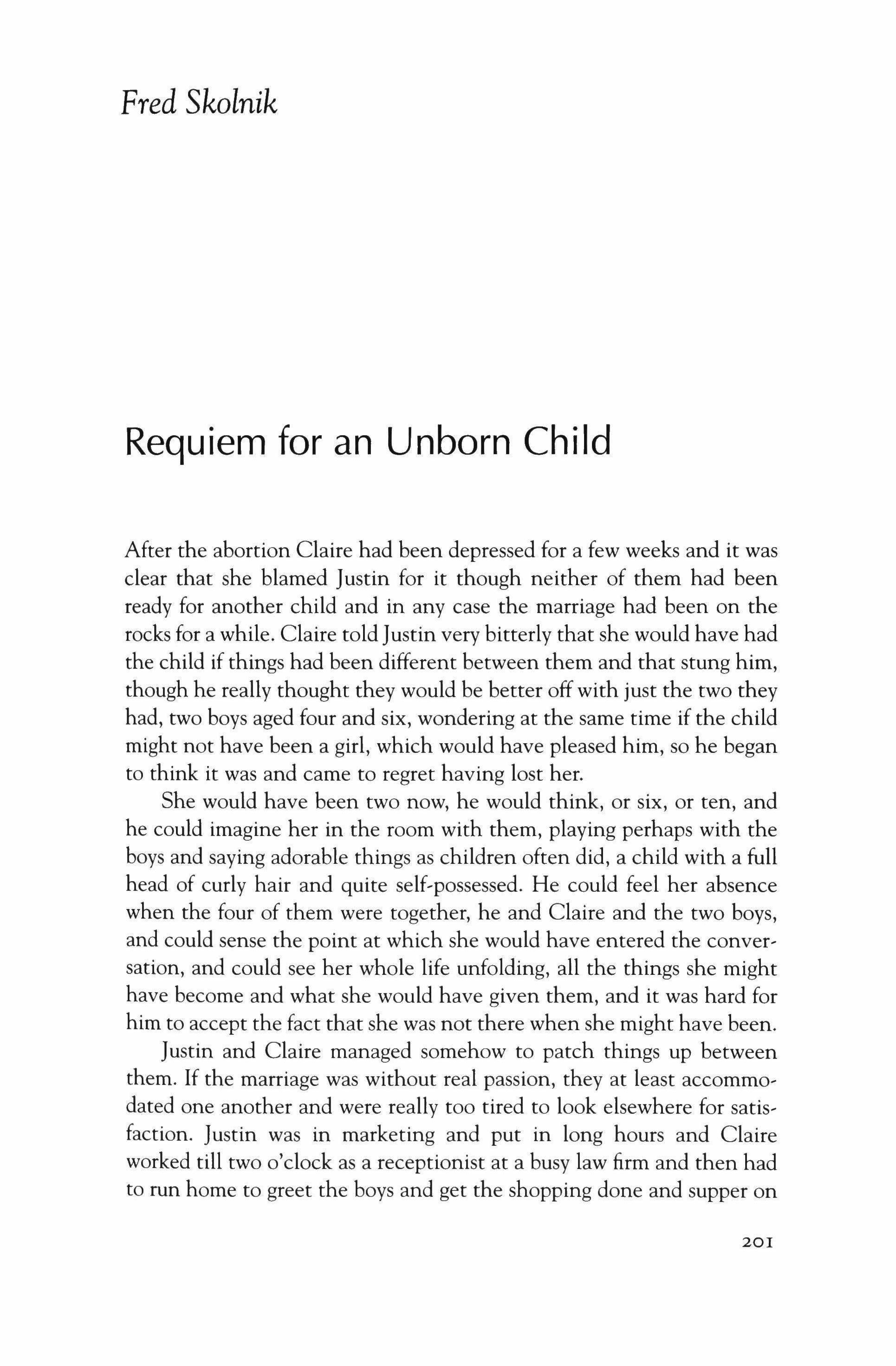
Requiem for an Unborn Child
After the abortion Claire had been depressed for a few weeks and it was clear that she blamed Justin for it though neither of them had been ready for another child and in any case the marriage had been on the rocks for a while. Claire told Justin very bitterly that she would have had the child if things had been different between them and that stung him, though he really thought they would be better off with just the two they had, two boys aged four and six, wondering at the same time if the child might not have been a girl, which would have pleased him, so he began to think it was and came to regret having lost her.
She would have been two now, he would think, or six, or ten, and he could imagine her in the room with them, playing perhaps with the boys and saying adorable things as children often did, a child with a full head of curly hair and quite self-possessed. He could feel her absence when the four of them were together, he and Claire and the two boys, and could sense the point at which she would have entered the conversation, and could see her whole life unfolding, all the things she might have become and what she would have given them, and it was hard for him to accept the fact that she was not there when she might have been.
Justin and Claire managed somehow to patch things up between them. If the marriage was without real passion, they at least accommodated one another and were really too tired to look elsewhere for satisfaction. Justin was in marketing and put in long hours and Claire worked till two o'clock as a receptionist at a busy law firm and then had to run home to greet the boys and get the shopping done and supper on
201
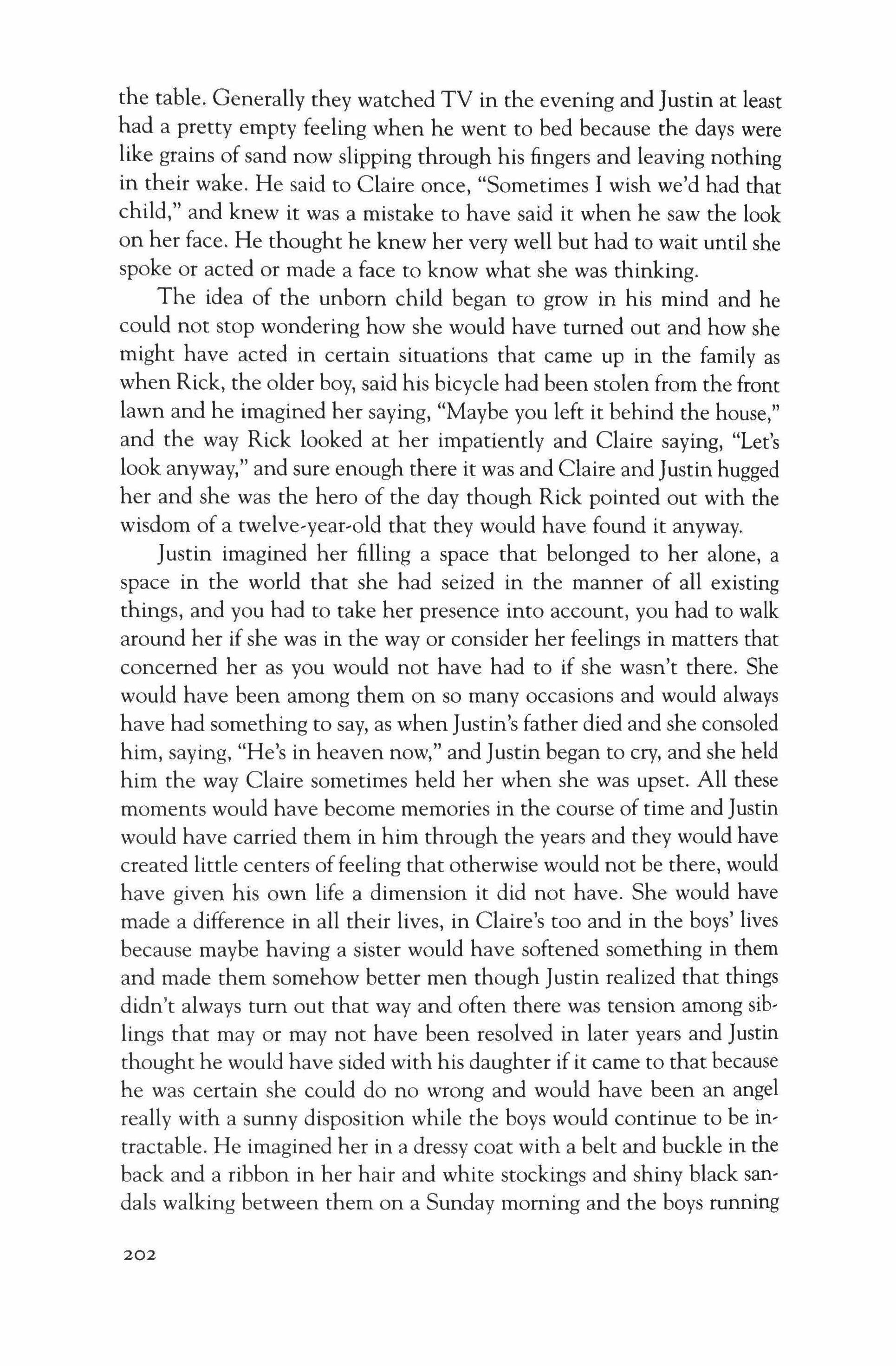
the table. Generally they watched TV in the evening and Justin at least had a pretty empty feeling when he went to bed because the days were like grains of sand now slipping through his fingers and leaving nothing in their wake. He said to Claire once, "Sometimes I wish we'd had that child," and knew it was a mistake to have said it when he saw the look on her face. He thought he knew her very well but had to wait until she spoke or acted or made a face to know what she was thinking.
The idea of the unborn child began to grow in his mind and he could not stop wondering how she would have turned out and how she might have acted in certain situations that came up in the family as when Rick, the older boy, said his bicycle had been stolen from the front lawn and he imagined her saying, "Maybe you left it behind the house," and the way Rick looked at her impatiently and Claire saying, "Let's look anyway," and sure enough there it was and Claire and Justin hugged her and she was the hero of the day though Rick pointed out with the wisdom of a twelve-year-old that they would have found it anyway.
Justin imagined her filling a space that belonged to her alone, a space in the world that she had seized in the manner of all existing things, and you had to take her presence into account, you had to walk around her if she was in the way or consider her feelings in matters that concerned her as you would not have had to if she wasn't there. She would have been among them on so many occasions and would always have had something to say, as when Justin's father died and she consoled him, saying, "He's in heaven now," and Justin began to cry, and she held him the way Claire sometimes held her when she was upset. All these moments would have become memories in the course of time and Justin would have carried them in him through the years and they would have created little centers offeeling that otherwise would not be there, would have given his own life a dimension it did not have. She would have made a difference in all their lives, in Claire's too and in the boys' lives because maybe having a sister would have softened something in them and made them somehow better men though Justin realized that things didn't always tum out that way and often there was tension among siblings that mayor may not have been resolved in later years and Justin thought he would have sided with his daughter if it came to that because he was certain she could do no wrong and would have been an angel really with a sunny disposition while the boys would continue to be intractable. He imagined her in a dressy coat with a belt and buckle in the back and a ribbon in her hair and white stockings and shiny black sandals walking between them on a Sunday morning and the boys running
202
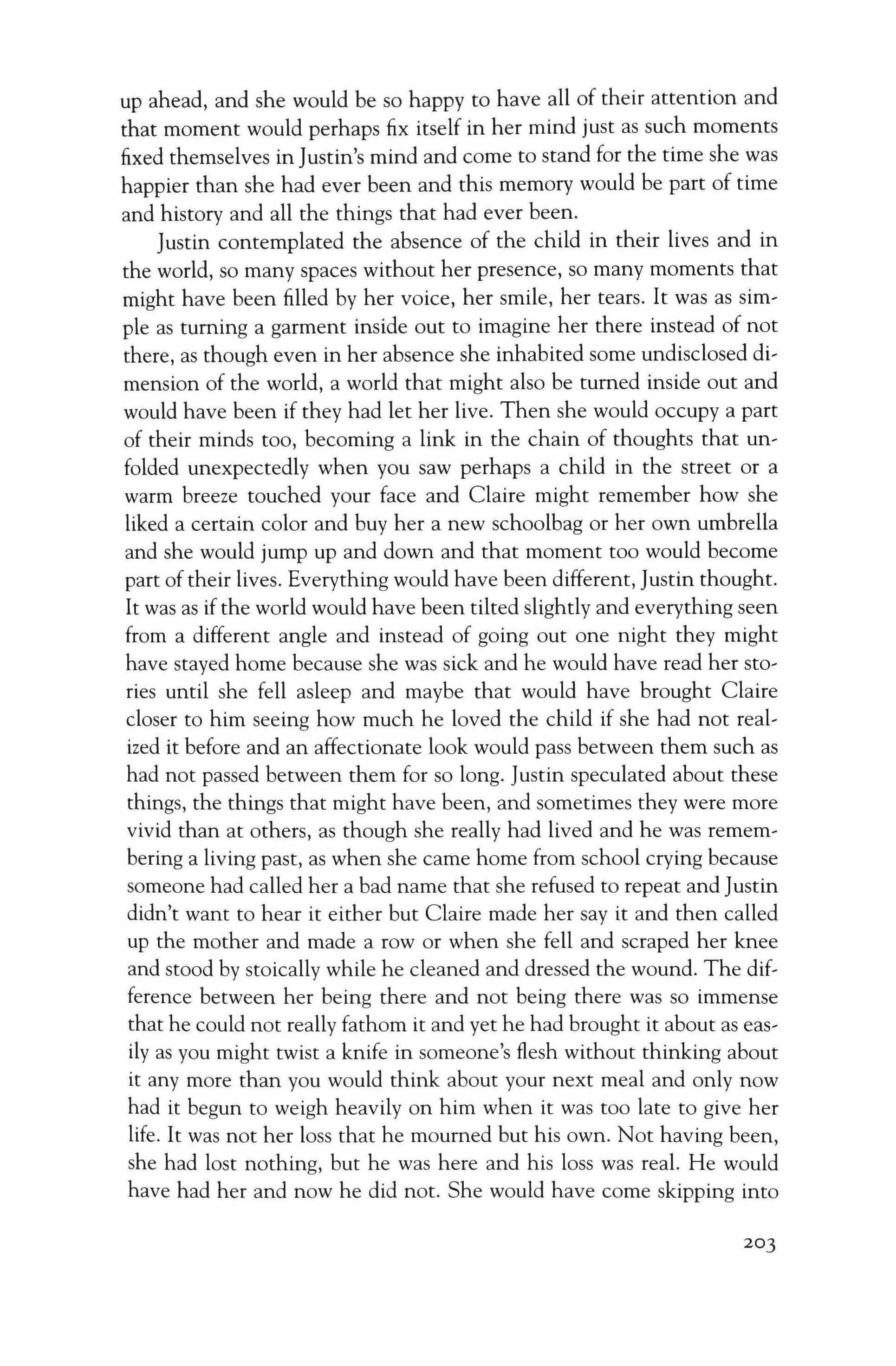
up ahead, and she would be so happy to have all of their attention and that moment would perhaps fix itself in her mind just as such moments fixed themselves in Justin's mind and come to stand for the time she was happier than she had ever been and this memory would be part of time and history and all the things that had ever been. Justin contemplated the absence of the child in their lives and in the world, so many spaces without her presence, so many moments that might have been filled by her voice, her smile, her tears. It was as simple as turning a garment inside out to imagine her there instead of not there, as though even in her absence she inhabited some undisclosed dimension of the world, a world that might also be turned inside out and would have been if they had let her live. Then she would occupy a part of their minds too, becoming a link in the chain of thoughts that un, folded unexpectedly when you saw perhaps a child in the street or a warm breeze touched your face and Claire might remember how she liked a certain color and buy her a new schoolbag or her own umbrella and she would jump up and down and that moment too would become part of their lives. Everything would have been different, Justin thought. It was as ifthe world would have been tilted slightly and everything seen from a different angle and instead of going out one night they might have stayed home because she was sick and he would have read her stories until she fell asleep and maybe that would have brought Claire closer to him seeing how much he loved the child if she had not real, ized it before and an affectionate look would pass between them such as had not passed between them for so long. Justin speculated about these things, the things that might have been, and sometimes they were more vivid than at others, as though she really had lived and he was rernembering a living past, as when she came home from school crying because someone had called her a bad name that she refused to repeat and Justin didn't want to hear it either but Claire made her say it and then called up the mother and made a row or when she fell and scraped her knee and stood by stoically while he cleaned and dressed the wound. The difference between her being there and not being there was so immense that he could not really fathom it and yet he had brought it about as easily as you might twist a knife in someone's flesh without thinking about it any more than you would think about your next meal and only now had it begun to weigh heavily on him when it was too late to give her life. It was not her loss that he mourned but his own. Not having been, she had lost nothing, but he was here and his loss was real. He would have had her and now he did not. She would have come skipping into
203
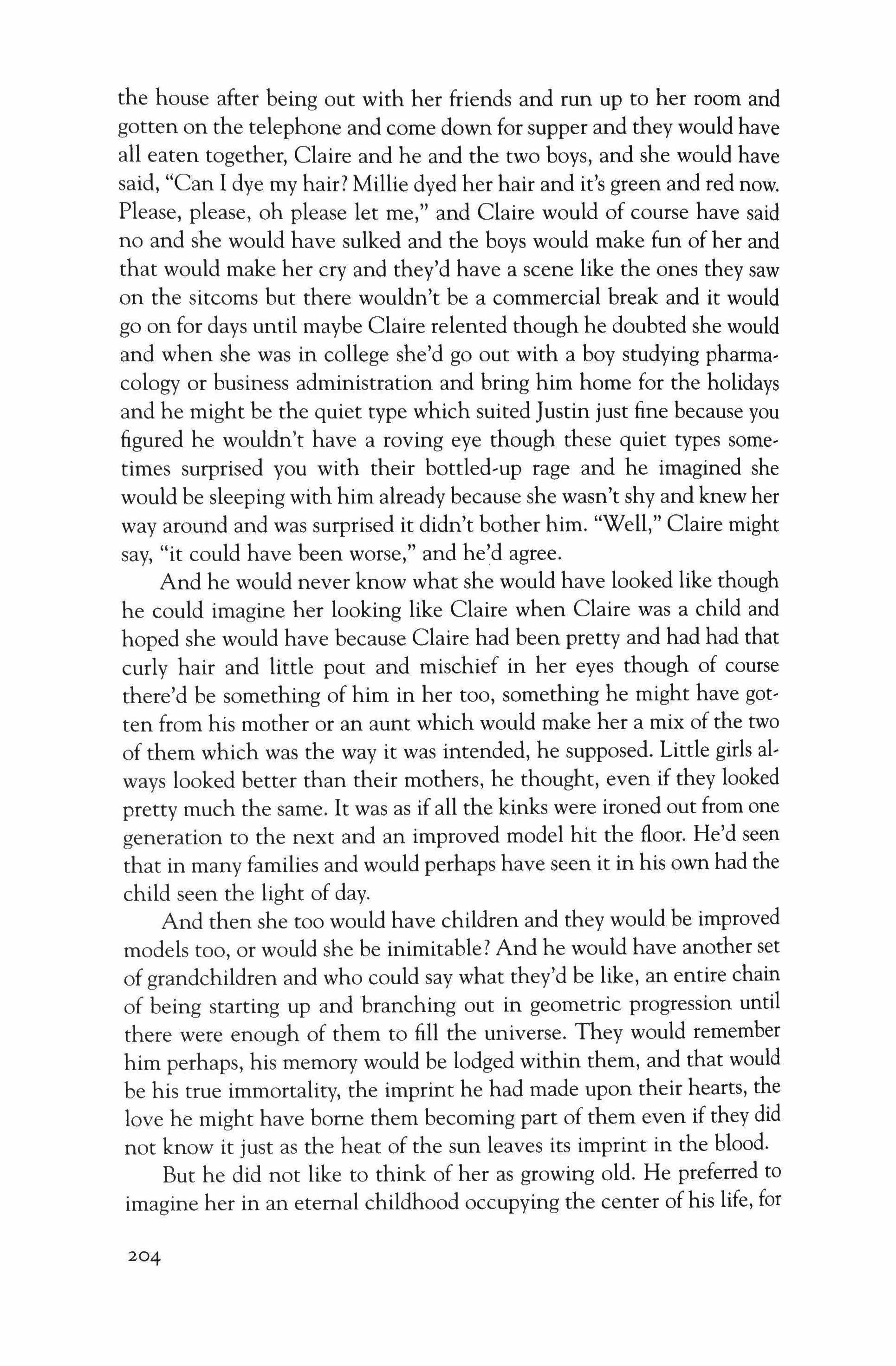
the house after being out with her friends and run up to her room and gotten on the telephone and come down for supper and they would have all eaten together, Claire and he and the two boys, and she would have said, "Can I dye my hair? Millie dyed her hair and it's green and red now. Please, please, oh please let me," and Claire would of course have said no and she would have sulked and the boys would make fun of her and that would make her cry and they'd have a scene like the ones they saw on the sitcoms but there wouldn't be a commercial break and it would go on for days until maybe Claire relented though he doubted she would and when she was in college she'd go out with a boy studying pharmacology or business administration and bring him home for the holidays and he might be the quiet type which suited Justin just fine because you figured he wouldn't have a roving eye though these quiet types sometimes surprised you with their bottled-up rage and he imagined she would be sleeping with him already because she wasn't shy and knew her way around and was surprised it didn't bother him. "Well," Claire might say, "it could have been worse," and he'd agree.
And he would never know what she would have looked like though he could imagine her looking like Claire when Claire was a child and hoped she would have because Claire had been pretty and had had that curly hair and little pout and mischief in her eyes though of course there'd be something of him in her too, something he might have gotten from his mother or an aunt which would make her a mix of the two of them which was the way it was intended, he supposed. Little girls always looked better than their mothers, he thought, even if they looked pretty much the same. It was as if all the kinks were ironed out from one generation to the next and an improved model hit the floor. He'd seen that in many families and would perhaps have seen it in his own had the child seen the light of day.
And then she too would have children and they would be improved models too, or would she be inimitable? And he would have another set of grandchildren and who could say what they'd be like, an entire chain of being starting up and branching out in geometric progression until there were enough of them to fill the universe. They would remember him perhaps, his memory would be lodged within them, and that would be his true immortality, the imprint he had made upon their hearts, the love he might have borne them becoming part of them even if they did not know it just as the heat of the sun leaves its imprint in the blood.
But he did not like to think of her as growing old. He preferred to imagine her in an eternal childhood occupying the center of his life, for
204
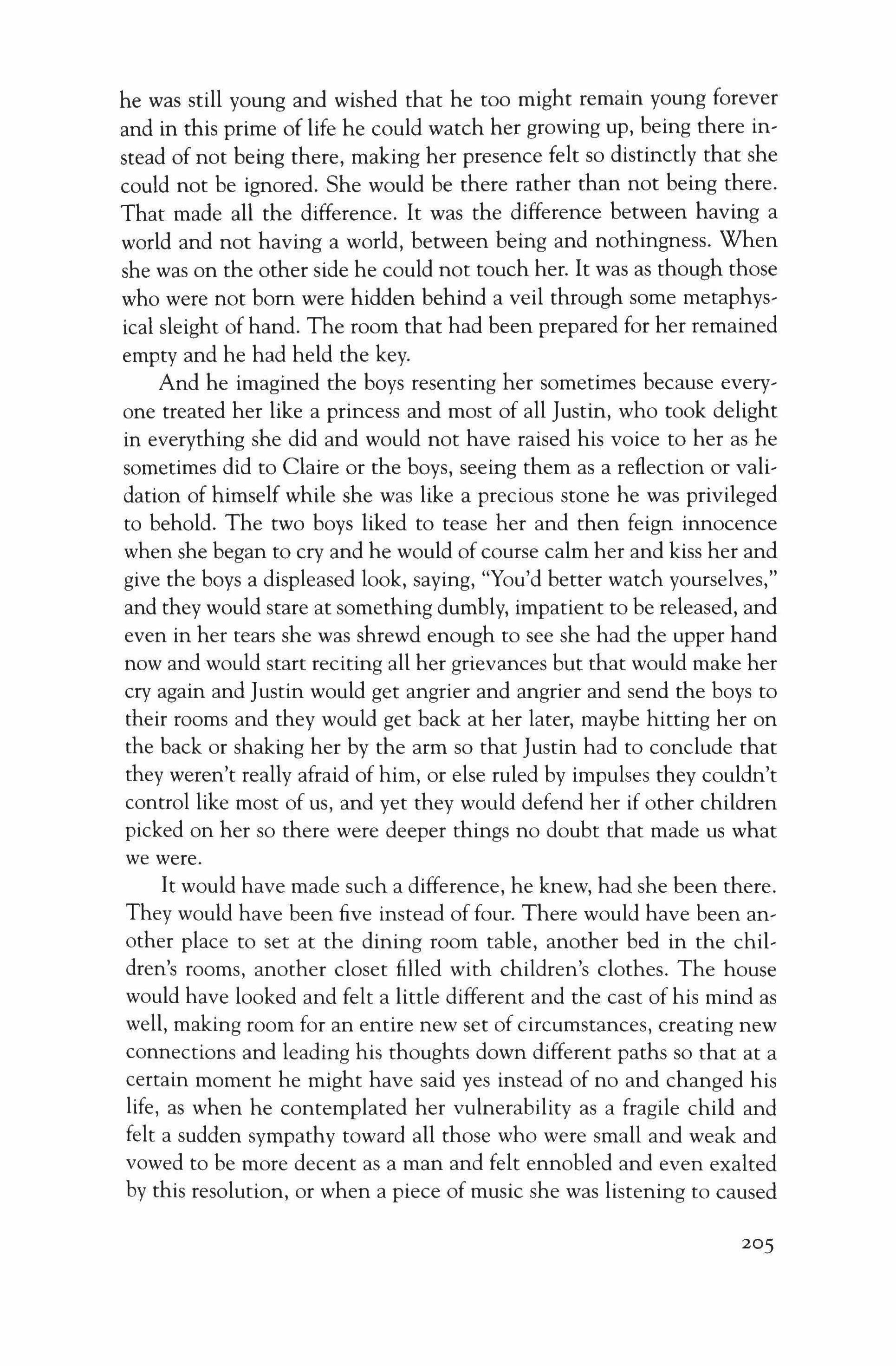
he was still young and wished that he too might remain young forever and in this prime of life he could watch her growing up, being there instead of not being there, making her presence felt so distinctly that she could not be ignored. She would be there rather than not being there. That made all the difference. It was the difference between having a world and not having a world, between being and nothingness. When she was on the other side he could not touch her. It was as though those who were not born were hidden behind a veil through some metaphysical sleight of hand. The room that had been prepared for her remained empty and he had held the key.
And he imagined the boys resenting her sometimes because everyone treated her like a princess and most of all Justin, who took delight in everything she did and would not have raised his voice to her as he sometimes did to Claire or the boys, seeing them as a reflection or validation of himself while she was like a precious stone he was privileged to behold. The two boys liked to tease her and then feign innocence when she began to cry and he would of course calm her and kiss her and give the boys a displeased look, saying, "You'd better watch yourselves," and they would stare at something dumbly, impatient to be released, and even in her tears she was shrewd enough to see she had the upper hand now and would start reciting all her grievances but that would make her cry again and Justin would get angrier and angrier and send the boys to their rooms and they would get back at her later, maybe hitting her on the back or shaking her by the arm so that Justin had to conclude that they weren't really afraid of him, or else ruled by impulses they couldn't control like most of us, and yet they would defend her if other children picked on her so there were deeper things no doubt that made us what we were.
It would have made such a difference, he knew, had she been there. They would have been five instead of four. There would have been another place to set at the dining room table, another bed in the children's rooms, another closet filled with children's clothes. The house would have looked and felt a little different and the cast of his mind as well, making room for an entire new set of circumstances, creating new connections and leading his thoughts down different paths so that at a certain moment he might have said yes instead of no and changed his life, as when he contemplated her vulnerability as a fragile child and felt a sudden sympathy toward all those who were small and weak and vowed to be more decent as a man and felt ennobled and even exalted by this resolution, or when a piece of music she was listening to caused
205

his mind to wander and created a mood in him he had not known before; but most of all it would have been the fact of her existence that altered his perspective, coloring every moment of his life like a little sun illuminating his world.
And all the family moments would have been different when she added her voice to the chorus though the boys might try to shut her up. It wouldn't help. She would always make herself heard, in a piping child's voice or the impatient and disdainful voice of a teenager and they would argue things back and forth or discuss the state of the nation or the future of the world and she would have very definite ideas about everything, more categorical the older she got, being better read and sharper in her mind than the two boys so in the end just the two of them would be left, she and Justin, having one of their deep conversations while Claire did the dishes and the boys watched TV, and she would say something about Plato or Marx and he couldn't really keep up with her, she knew more than he did when it came to what you got from books but also seemed to have a finer sensibility and it was really pointless to become one of those smug parents reminding their children of the practicalities of things though he was tempted to hold forth so as not to forfeit his parental role entirely. And he remembered talking to his own father in this way, though without the learned references, and the feeling of satisfaction it had given him to appear before his father in such a positive light, demonstrating his deepest knowledge and articulating his strongest thoughts, and imagined that she felt this satisfaction too and even excitement and was amazed at this insight, this sense of her he had, as though it had opened an entire world to him, the world of another being, and vowed to be the one she always talked to, a sounding board or safety valve, and so it might be for years to come, there would always be these intimate moments between them, and in a way he regretted that Claire would be excluded but understood that a mother and her daughter would have other things to talk about so he didn't feel so bad about it after all.
And he came back always to the moment when she would be there, to the moment when he first imagined her presence and understood what her absence meant, seeing her suddenly among them, and it was like a melody that always came back to the same bar or note and from there flowed out again, so that her entire life might stretch before him and he could find it in a thousand different places in a thousand different ways. One morning he had woken up alone in bed and had had some time to think before Claire began wondering why he didn't come
206
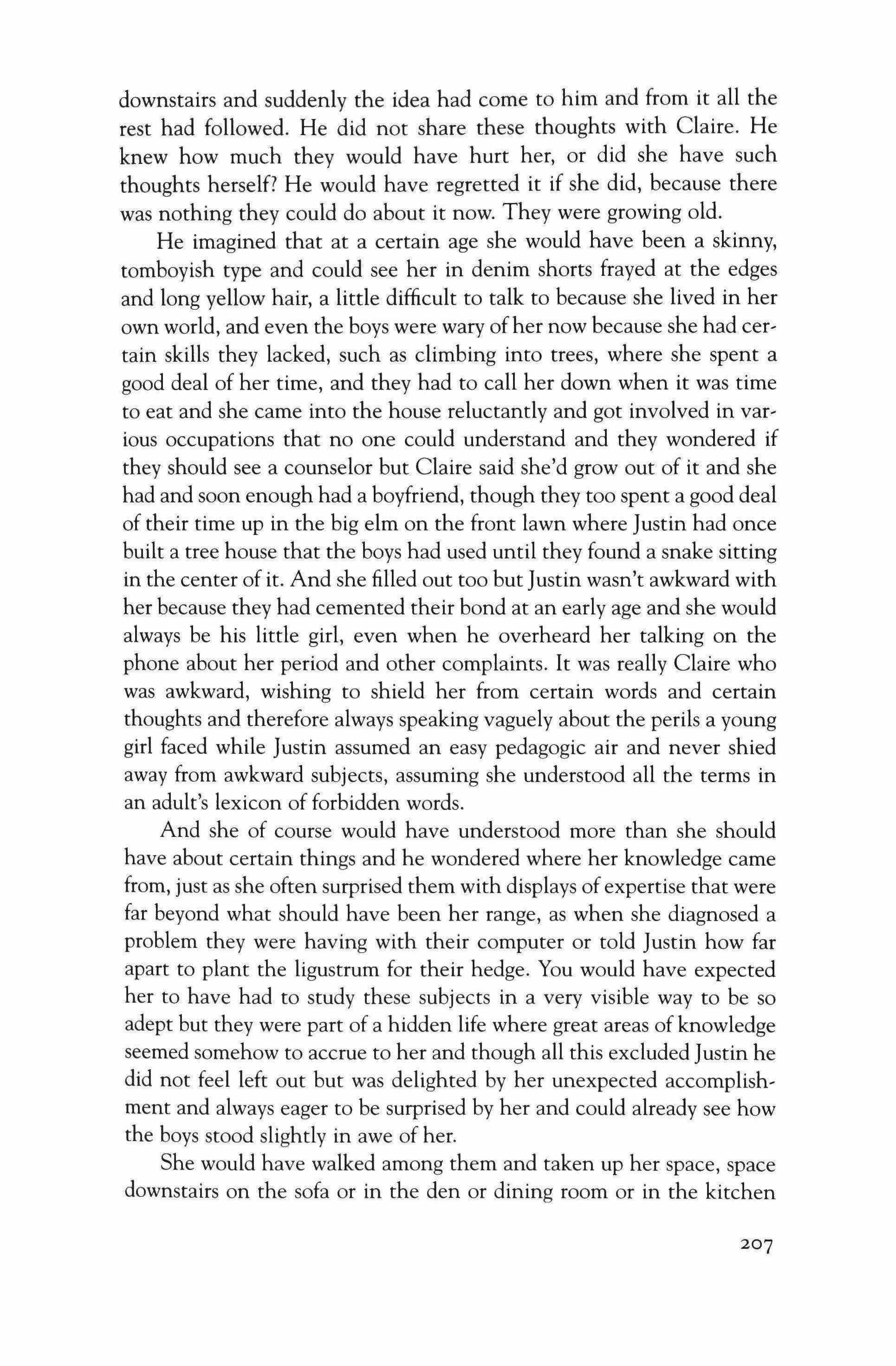
downstairs and suddenly the idea had come to him and from it all the rest had followed. He did not share these thoughts with Claire. He knew how much they would have hurt her, or did she have such thoughts herself? He would have regretted it if she did, because there was nothing they could do about it now. They were growing old.
He imagined that at a certain age she would have been a skinny, tomboyish type and could see her in denim shorts frayed at the edges and long yellow hair, a little difficult to talk to because she lived in her own world, and even the boys were wary ofher now because she had certain skills they lacked, such as climbing into trees, where she spent a good deal of her time, and they had to call her down when it was time to eat and she came into the house reluctantly and got involved in various occupations that no one could understand and they wondered if they should see a counselor but Claire said she'd grow out of it and she had and soon enough had a boyfriend, though they too spent a good deal of their time up in the big elm on the front lawn where Justin had once built a tree house that the boys had used until they found a snake sitting in the center of it. And she filled out too but Justin wasn't awkward with her because they had cemented their bond at an early age and she would always be his little girl, even when he overheard her talking on the phone about her period and other complaints. It was really Claire who was awkward, wishing to shield her from certain words and certain thoughts and therefore always speaking vaguely about the perils a young girl faced while Justin assumed an easy pedagogic air and never shied away from awkward subjects, assuming she understood all the terms in an adult's lexicon of forbidden words.
And she of course would have understood more than she should have about certain things and he wondered where her knowledge came from, just as she often surprised them with displays ofexpertise that were far beyond what should have been her range, as when she diagnosed a problem they were having with their computer or told Justin how far apart to plant the ligustrum for their hedge. You would have expected her to have had to study these subjects in a very visible way to be so adept but they were part of a hidden life where great areas of knowledge seemed somehow to accrue to her and though all this excluded Justin he did not feel left out but was delighted by her unexpected accomplish, ment and always eager to be surprised by her and could already see how the boys stood slightly in awe of her.
She would have walked among them and taken up her space, space downstairs on the sofa or in the den or dining room or in the kitchen
207
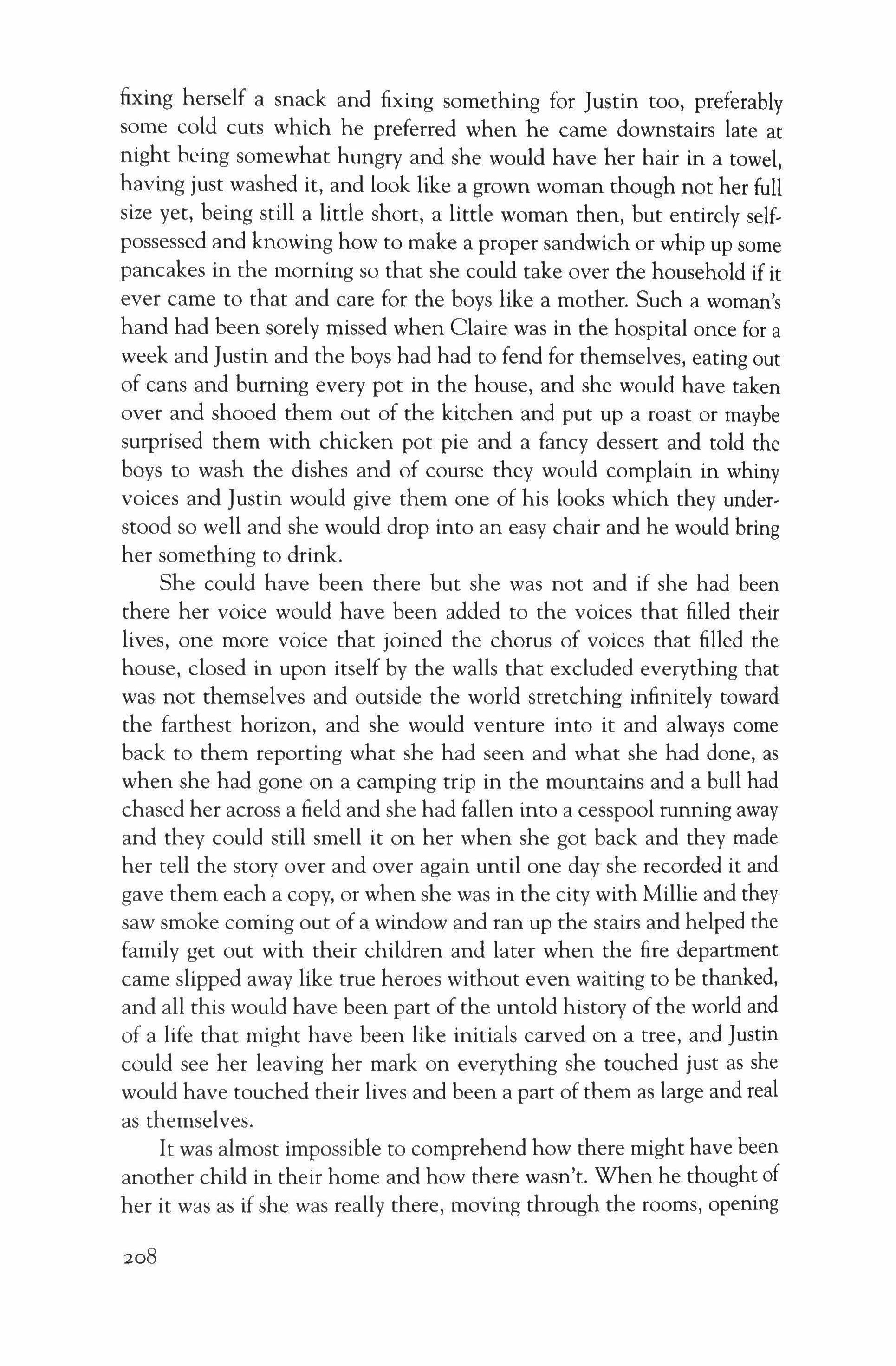
fixing herself a snack and fixing something for Justin too, preferably some cold cuts which he preferred when he came downstairs late at night being somewhat hungry and she would have her hair in a towel, having just washed it, and look like a grown woman though not her full size yet, being still a little short, a little woman then, but entirely selfpossessed and knowing how to make a proper sandwich or whip up some pancakes in the morning so that she could take over the household if it ever came to that and care for the boys like a mother. Such a woman's hand had been sorely missed when Claire was in the hospital once for a week and Justin and the boys had had to fend for themselves, eating out of cans and burning every pot in the house, and she would have taken over and shooed them out of the kitchen and put up a roast or maybe surprised them with chicken pot pie and a fancy dessert and told the boys to wash the dishes and of course they would complain in whiny voices and Justin would give them one of his looks which they understood so well and she would drop into an easy chair and he would bring her something to drink.
She could have been there but she was not and if she had been there her voice would have been added to the voices that filled their lives, one more voice that joined the chorus of voices that filled the house, closed in upon itself by the walls that excluded everything that was not themselves and outside the world stretching infinitely toward the farthest horizon, and she would venture into it and always come back to them reporting what she had seen and what she had done, as when she had gone on a camping trip in the mountains and a bull had chased her across a field and she had fallen into a cesspool running away and they could still smell it on her when she got back and they made her tell the story over and over again until one day she recorded it and gave them each a copy, or when she was in the city with Millie and they saw smoke coming out of a window and ran up the stairs and helped the family get out with their children and later when the fire department came slipped away like true heroes without even waiting to be thanked, and all this would have been part of the untold history of the world and of a life that might have been like initials carved on a tree, and Justin could see her leaving her mark on everything she touched just as she would have touched their lives and been a part of them as large and real as themselves.
It was almost impossible to comprehend how there might have been another child in their home and how there wasn't. When he thought of her it was as if she was really there, moving through the rooms, opening
208
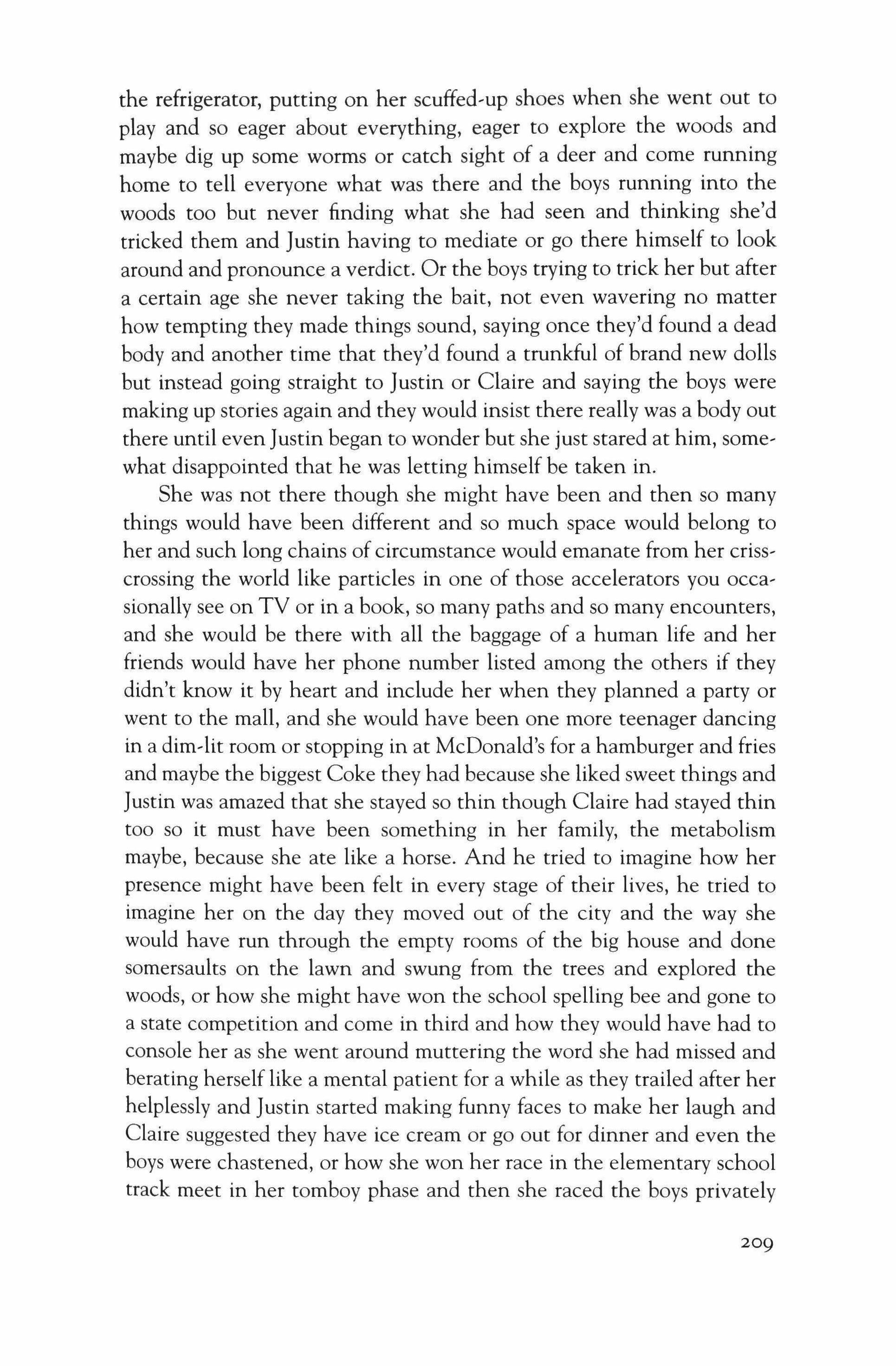
the refrigerator, putting on her scuffed-up shoes when she went out to play and so eager about everything, eager to explore the woods and maybe dig up some worms or catch sight of a deer and come running home to tell everyone what was there and the boys running into the woods too but never finding what she had seen and thinking she'd tricked them and Justin having to mediate or go there himself to look around and pronounce a verdict. Or the boys trying to trick her but after a certain age she never taking the bait, not even wavering no matter how tempting they made things sound, saying once they'd found a dead body and another time that they'd found a trunkful of brand new dolls but instead going straight to Justin or Claire and saying the boys were making up stories again and they would insist there really was a body out there until even Justin began to wonder but she just stared at him, somewhat disappointed that he was letting himself be taken in.
She was not there though she might have been and then so many things would have been different and so much space would belong to her and such long chains of circumstance would emanate from her crisscrossing the world like particles in one of those accelerators you occasionally see on TV or in a book, so many paths and so many encounters, and she would be there with all the baggage of a human life and her friends would have her phone number listed among the others if they didn't know it by heart and include her when they planned a party or went to the mall, and she would have been one more teenager dancing in a dim-lit room or stopping in at McDonald's for a hamburger and fries and maybe the biggest Coke they had because she liked sweet things and Justin was amazed that she stayed so thin though Claire had stayed thin too so it must have been something in her family, the metabolism maybe, because she ate like a horse. And he tried to imagine how her presence might have been felt in every stage of their lives, he tried to imagine her on the day they moved out of the city and the way she would have run through the empty rooms of the big house and done somersaults on the lawn and swung from the trees and explored the woods, or how she might have won the school spelling bee and gone to a state competition and come in third and how they would have had to console her as she went around muttering the word she had missed and berating herself like a mental patient for a while as they trailed after her helplessly and Justin started making funny faces to make her laugh and Claire suggested they have ice cream or go out for dinner and even the boys were chastened, or how she won her race in the elementary school track meet in her tomboy phase and then she raced the boys privately
209
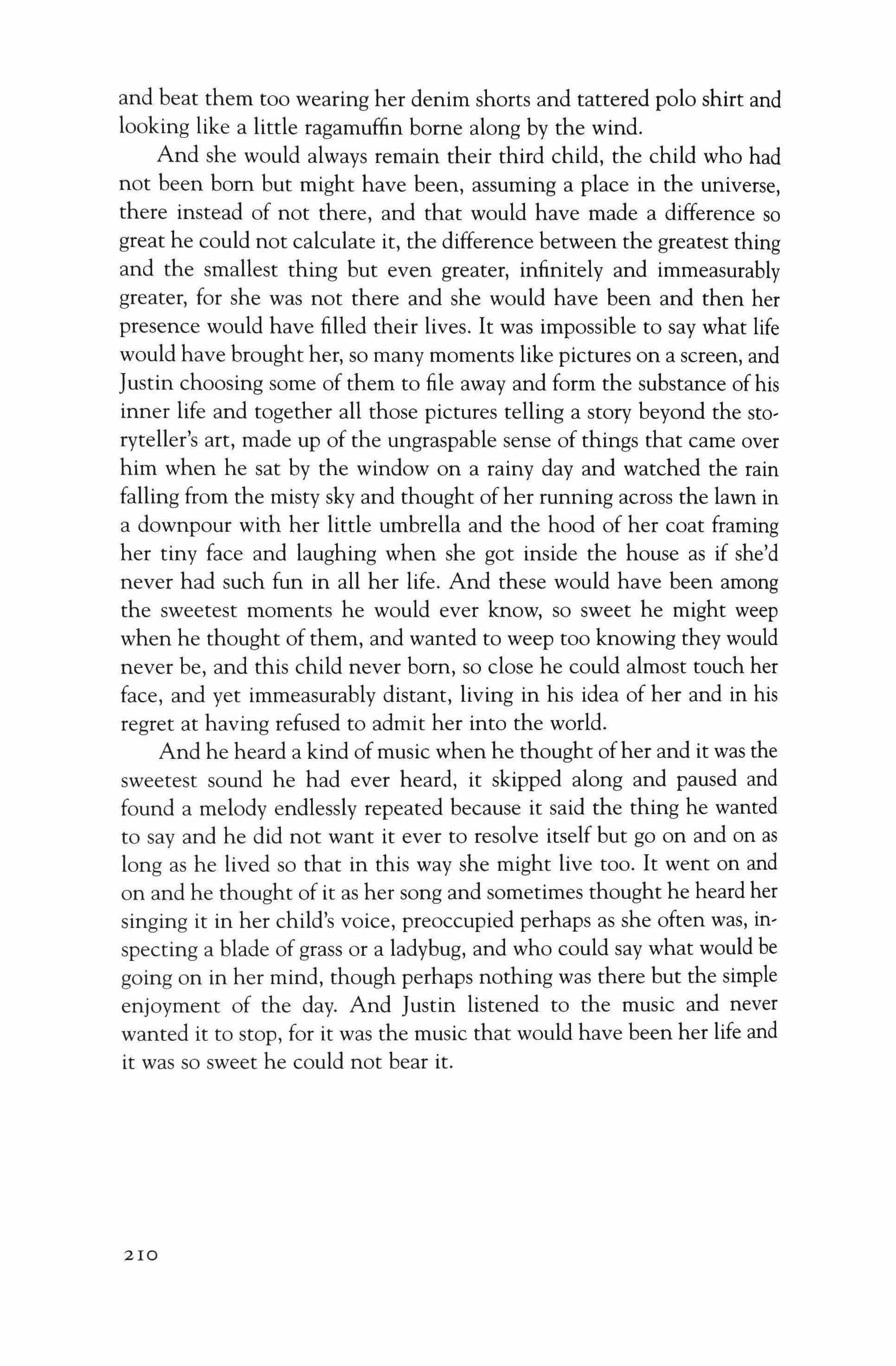
and beat them too wearing her denim shorts and tattered polo shirt and looking like a little ragamuffin borne along by the wind.
And she would always remain their third child, the child who had not been born but might have been, assuming a place in the universe, there instead of not there, and that would have made a difference so great he could not calculate it, the difference between the greatest thing and the smallest thing but even greater, infinitely and immeasurably greater, for she was not there and she would have been and then her presence would have filled their lives. It was impossible to say what life would have brought her, so many moments like pictures on a screen, and Justin choosing some of them to file away and form the substance of his inner life and together all those pictures telling a story beyond the storyteller's art, made up of the ungraspable sense of things that came over him when he sat by the window on a rainy day and watched the rain falling from the misty sky and thought of her running across the lawn in a downpour with her little umbrella and the hood of her coat framing her tiny face and laughing when she got inside the house as if she'd never had such fun in all her life. And these would have been among the sweetest moments he would ever know, so sweet he might weep when he thought of them, and wanted to weep too knowing they would never be, and this child never born, so close he could almost touch her face, and yet immeasurably distant, living in his idea of her and in his regret at having refused to admit her into the world.
And he heard a kind of music when he thought ofher and it was the sweetest sound he had ever heard, it skipped along and paused and found a melody endlessly repeated because it said the thing he wanted to say and he did not want it ever to resolve itself but go on and on as long as he lived so that in this way she might live too. It went on and on and he thought of it as her song and sometimes thought he heard her singing it in her child's voice, preoccupied perhaps as she often was, inspecting a blade of grass or a ladybug, and who could say what would be going on in her mind, though perhaps nothing was there but the simple enjoyment of the day. And Justin listened to the music and never wanted it to stop, for it was the music that would have been her life and it was so sweet he could not bear it.
210
Justin Kramon
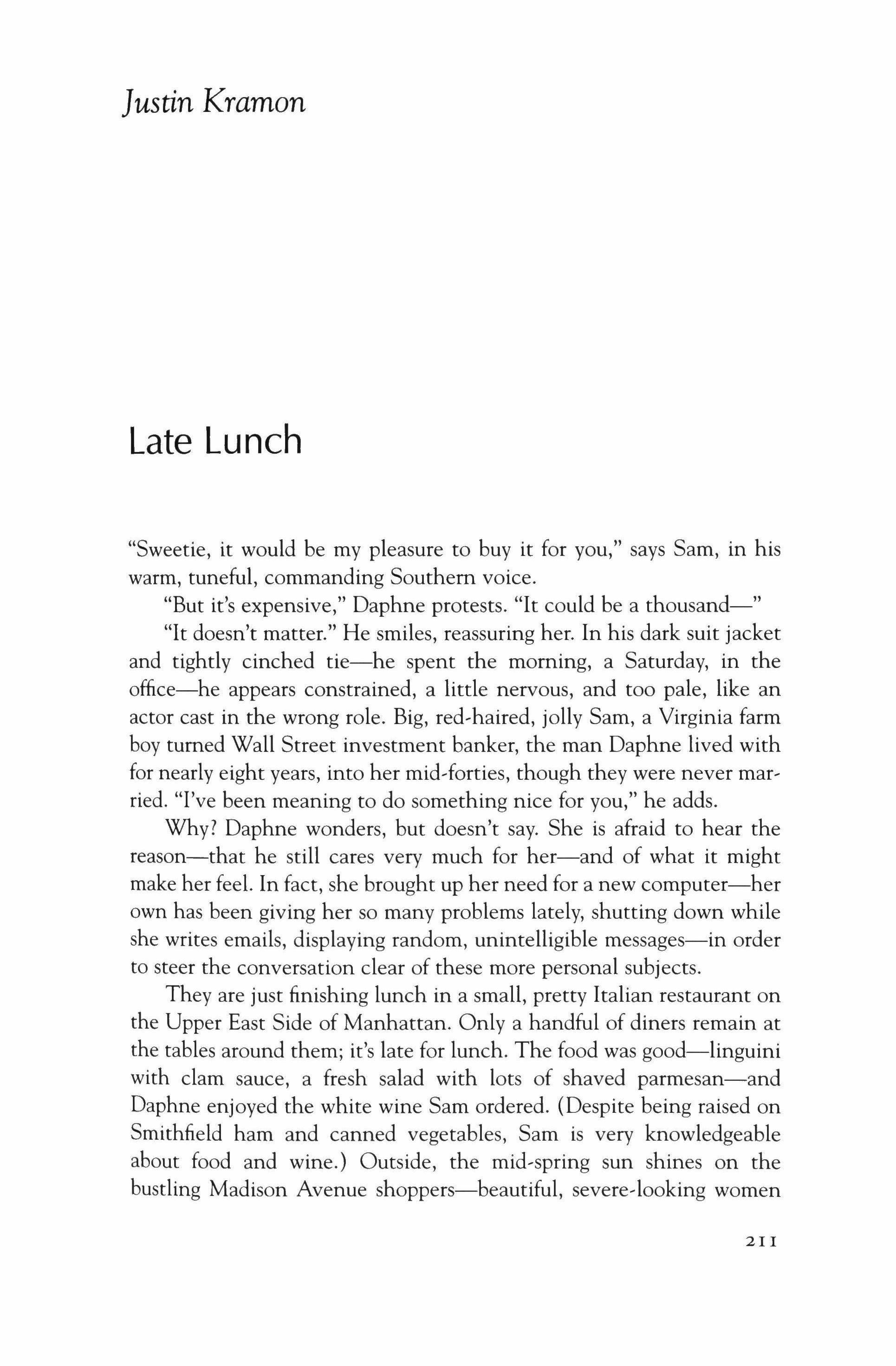
Late Lunch
"Sweetie, it would be my pleasure to buy it for you," says Sam, in his warm, tuneful, commanding Southern voice.
"But it's expensive," Daphne protests. "It could be a thousand-" "It doesn't matter." He smiles, reassuring her. In his dark suit jacket and tightly cinched tie-he spent the morning, a Saturday, in the office-he appears constrained, a little nervous, and too pale, like an actor cast in the wrong role. Big, red-haired, jolly Sam, a Virginia farm boy turned Wall Street investment banker, the man Daphne lived with for nearly eight years, into her mid-forties, though they were never married. "I've been meaning to do something nice for you," he adds.
Why? Daphne wonders, but doesn't say. She is afraid to hear the reason-that he still cares very much for her-and of what it might make her feel. In fact, she brought up her need for a new computer-her own has been giving her so many problems lately, shutting down while she writes emails, displaying random, unintelligible messages-in order to steer the conversation clear of these more personal subjects.
They are just finishing lunch in a small, pretty Italian restaurant on the Upper East Side of Manhattan. Only a handful of diners remain at the tables around them; it's late for lunch. The food was good-linguini with clam sauce, a fresh salad with lots of shaved parmesan-and Daphne enjoyed the white wine Sam ordered. (Despite being raised on Smithfield ham and canned vegetables, Sam is very knowledgeable about food and wine.) Outside, the mid-spring sun shines on the bustling Madison Avenue shoppers-beautiful, severe-looking women
211
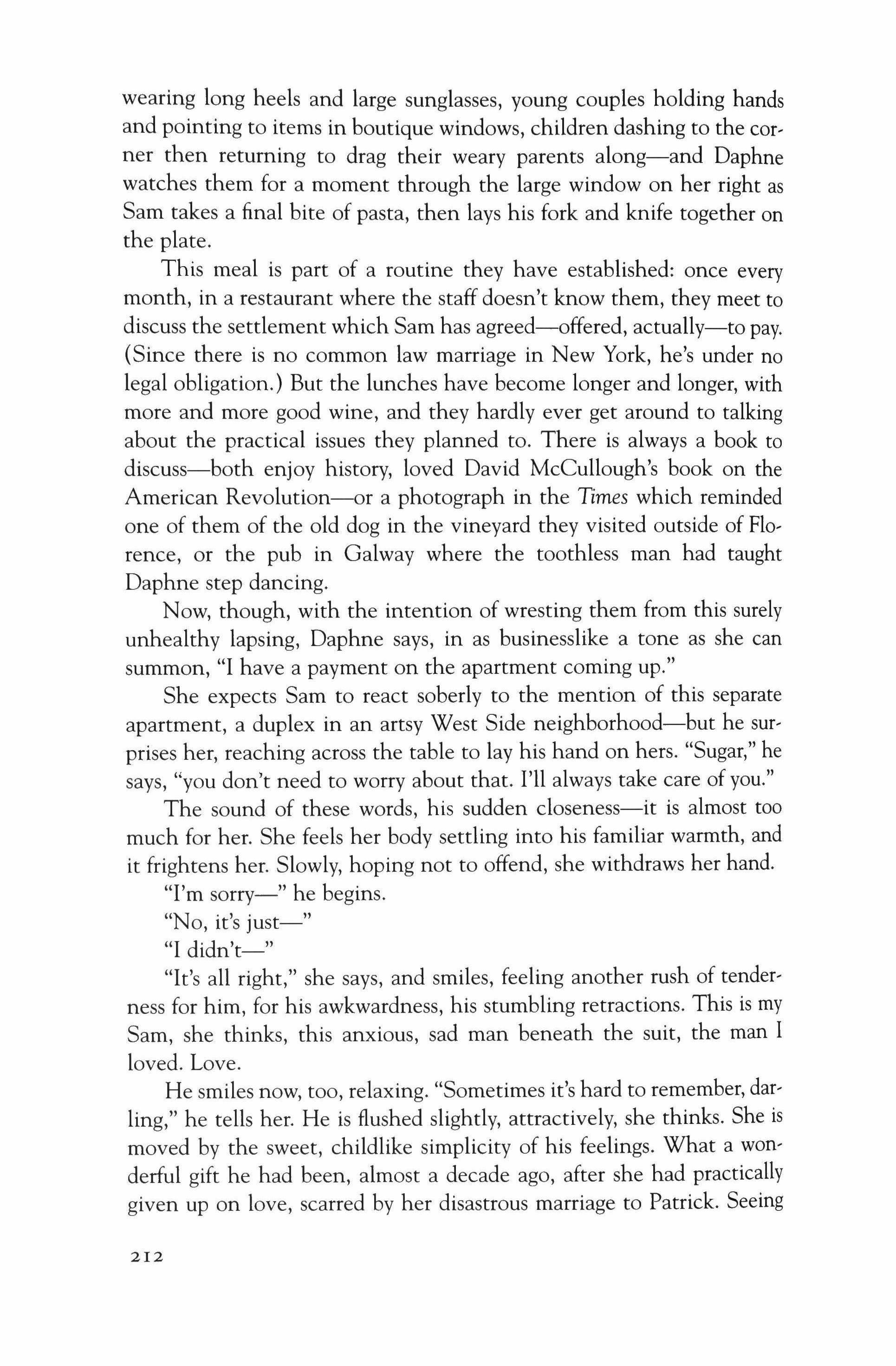
wearing long heels and large sunglasses, young couples holding hands and pointing to items in boutique windows, children dashing to the corner then returning to drag their weary parents along-and Daphne watches them for a moment through the large window on her right as Sam takes a final bite of pasta, then lays his fork and knife together on the plate.
This meal is part of a routine they have established: once every month, in a restaurant where the staff doesn't know them, they meet to discuss the settlement which Sam has agreed-offered, actually-to pay. (Since there is no common law marriage in New York, he's under no legal obligation.) But the lunches have become longer and longer, with more and more good wine, and they hardly ever get around to talking about the practical issues they planned to. There is always a book to discuss-both enjoy history, loved David McCullough's book on the American Revolution-or a photograph in the Times which reminded one of them of the old dog in the vineyard they visited outside of florence, or the pub in Galway where the toothless man had taught Daphne step dancing.
Now, though, with the intention of wresting them from this surely unhealthy lapsing, Daphne says, in as businesslike a tone as she can summon, "I have a payment on the apartment coming up."
She expects Sam to react soberly to the mention of this separate apartment, a duplex in an artsy West Side neighborhood-but he surprises her, reaching across the table to lay his hand on hers. "Sugar," he says, "you don't need to worry about that. I'll always take care of you."
The sound of these words, his sudden closeness-it is almost too much for her. She feels her body settling into his familiar warmth, and it frightens her. Slowly, hoping not to offend, she withdraws her hand.
"I'm sorry-" he begins.
"No, it's just-" "I didn't-"
"It's all right," she says, and smiles, feeling another rush of tenderness for him, for his awkwardness, his stumbling retractions. This is my Sam, she thinks, this anxious, sad man beneath the suit, the man I loved. Love.
He smiles now, too, relaxing. "Sometimes it's hard to remember, darling," he tells her. He is flushed slightly, attractively, she thinks. She is moved by the sweet, childlike simplicity of his feelings. What a wonderful gift he had been, almost a decade ago, after she had practically given up on love, scarred by her disastrous marriage to Patrick. Seeing
212
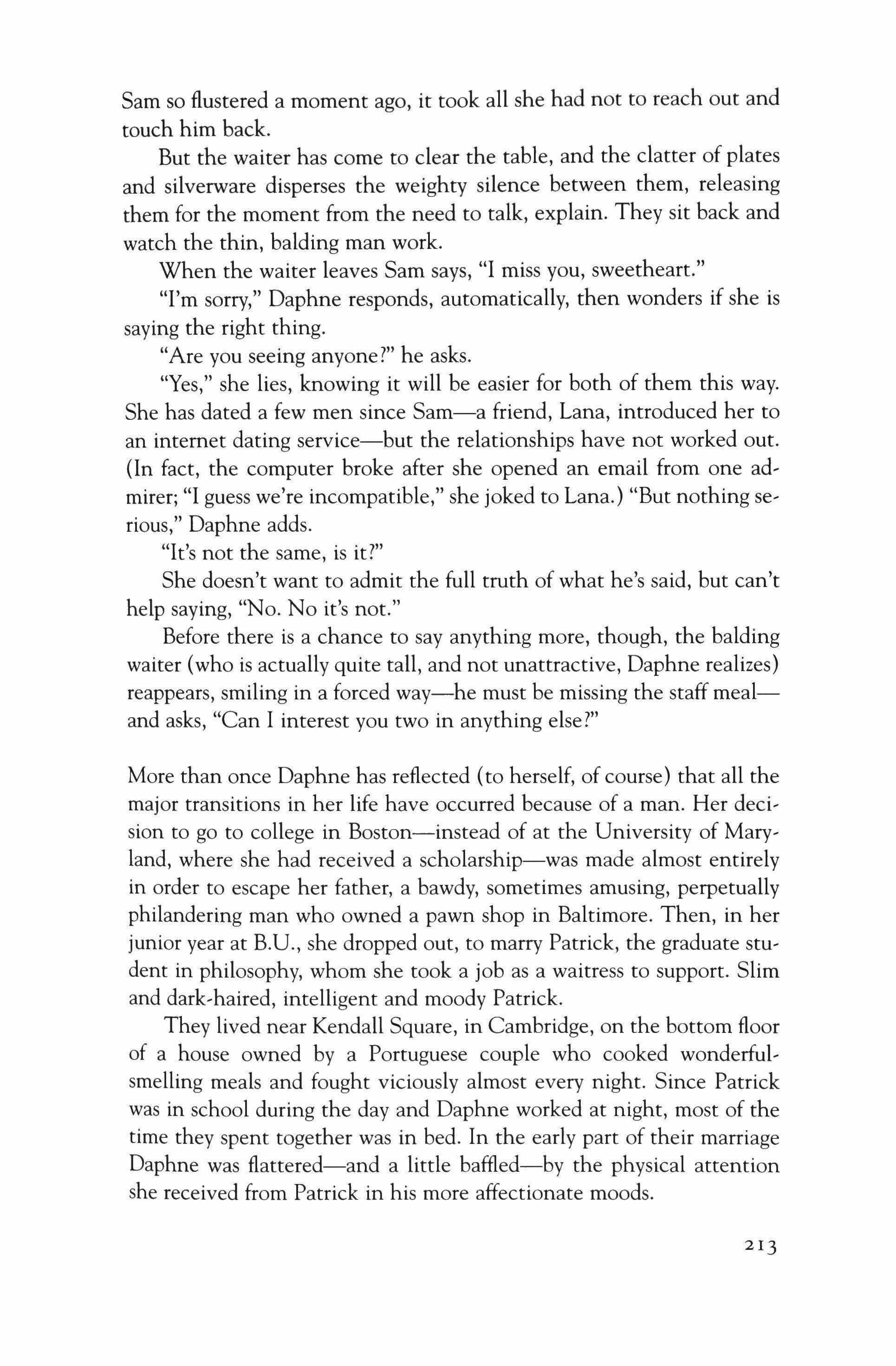
Sam so flustered a moment ago, it took all she had not to reach out and touch him back.
But the waiter has come to clear the table, and the clatter of plates and silverware disperses the weighty silence between them, releasing them for the moment from the need to talk, explain. They sit back and watch the thin, balding man work.
When the waiter leaves Sam says, "I miss you, sweetheart."
"I'm sorry," Daphne responds, automatically, then wonders if she is saying the right thing.
"Are you seeing anyone?" he asks.
"Yes," she lies, knowing it will be easier for both of them this way. She has dated a few men since Sam-a friend, Lana, introduced her to an internet dating service-but the relationships have not worked out. {In fact, the computer broke after she opened an email from one admirer; "I guess we're incompatible," she joked to Lana.) "But nothing serious," Daphne adds.
"It's not the same, is it?"
She doesn't want to admit the full truth of what he's said, but can't help saying, "No. No it's not."
Before there is a chance to say anything more, though, the balding waiter {who is actually quite tall, and not unattractive, Daphne realizes} reappears, smiling in a forced way-he must be missing the staff mealand asks, "Can I interest you two in anything else?"
More than once Daphne has reflected {to herself, of course} that all the major transitions in her life have occurred because of a man. Her decision to go to college in Boston-instead of at the University of Maryland, where she had received a scholarship-was made almost entirely in order to escape her father, a bawdy, sometimes amusing, perpetually philandering man who owned a pawn shop in Baltimore. Then, in her junior year at B.U., she dropped out, to marry Patrick, the graduate student in philosophy, whom she took a job as a waitress to support. Slim and dark-haired, intelligent and moody Patrick.
They lived near Kendall Square, in Cambridge, on the bottom floor of a house owned by a Portuguese couple who cooked wonderfulsmelling meals and fought viciously almost every night. Since Patrick was in school during the day and Daphne worked at night, most of the time they spent together was in bed. In the early part of their marriage Daphne was flattered-and a little baffled-by the physical attention she received from Patrick in his more affectionate moods.
213
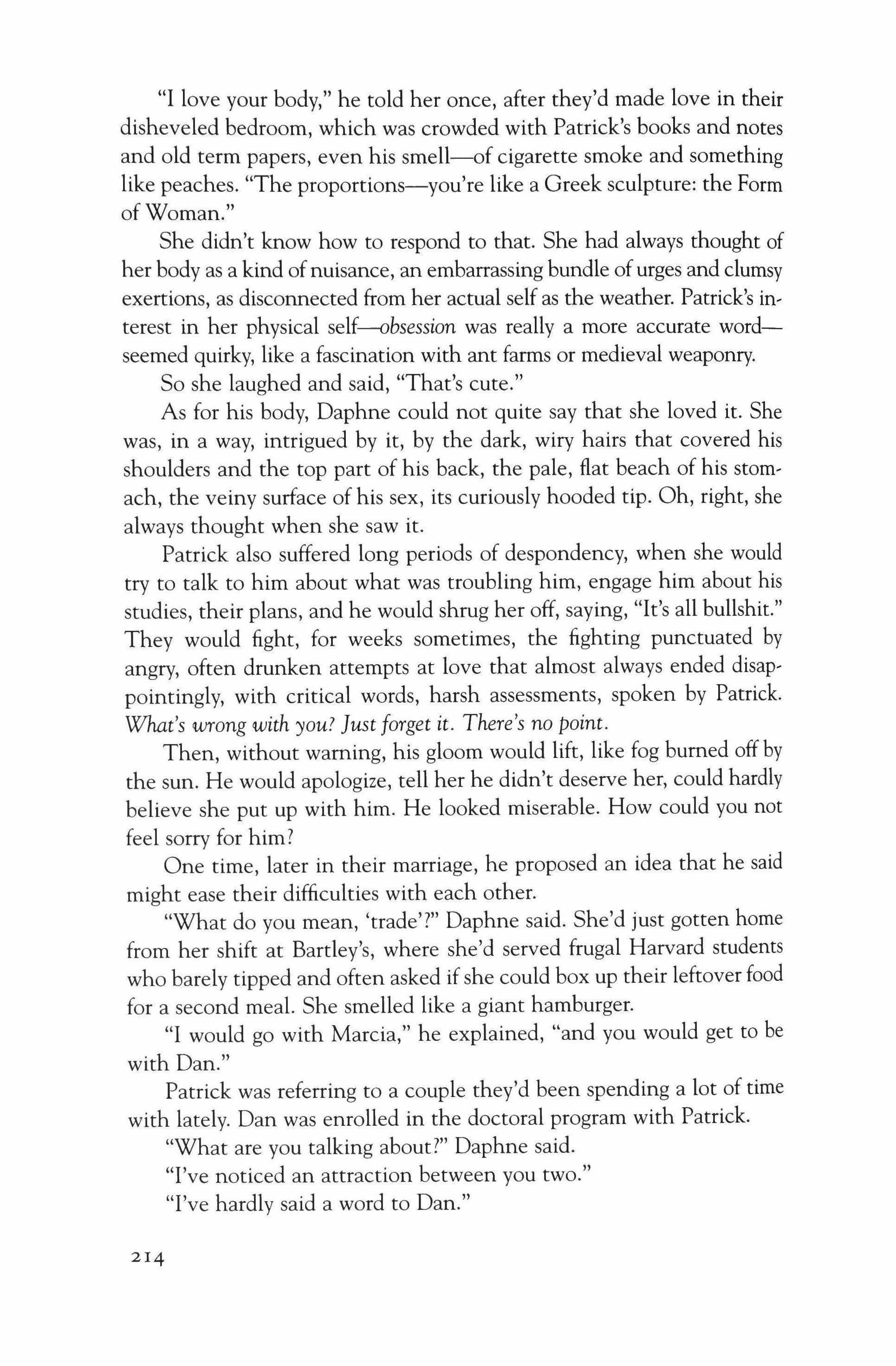
"I love your body," he told her once, after they'd made love in their disheveled bedroom, which was crowded with Patrick's books and notes and old term papers, even his smell-of cigarette smoke and something like peaches. "The proportions-you're like a Greek sculpture: the Form of Woman."
She didn't know how to respond to that. She had always thought of her body as a kind ofnuisance, an embarrassing bundle of urges and clumsy exertions, as disconnected from her actual self as the weather. Patrick's interest in her physical self--obsession was really a more accurate wordseemed quirky, like a fascination with ant farms or medieval weaponry.
So she laughed and said, "That's cute."
As for his body, Daphne could not quite say that she loved it. She was, in a way, intrigued by it, by the dark, wiry hairs that covered his shoulders and the top part of his back, the pale, flat beach of his stomach, the veiny surface of his sex, its curiously hooded tip. Oh, right, she always thought when she saw it.
Patrick also suffered long periods of despondency, when she would try to talk to him about what was troubling him, engage him about his studies, their plans, and he would shrug her off, saying, "It's all bullshit." They would fight, for weeks sometimes, the fighting punctuated by angry, often drunken attempts at love that almost always ended disappointingly, with critical words, harsh assessments, spoken by Patrick. What's wrong with you? Just forget it. There's no point.
Then, without warning, his gloom would lift, like fog burned off by the sun. He would apologize, tell her he didn't deserve her, could hardly believe she put up with him. He looked miserable. How could you not feel sorry for him?
One time, later in their marriage, he proposed an idea that he said might ease their difficulties with each other.
"What do you mean, 'trade'?" Daphne said. She'd just gotten home from her shift at Bartley's, where she'd served frugal Harvard students who barely tipped and often asked if she could box up their leftover food for a second meal. She smelled like a giant hamburger.
"I would go with Marcia," he explained, "and you would get to be with Dan."
Patrick was referring to a couple they'd been spending a lot of time with lately. Dan was enrolled in the doctoral program with Patrick.
"What are you talking about?" Daphne said.
"I've noticed an attraction between you two."
"I've hardly said a word to Dan."
214
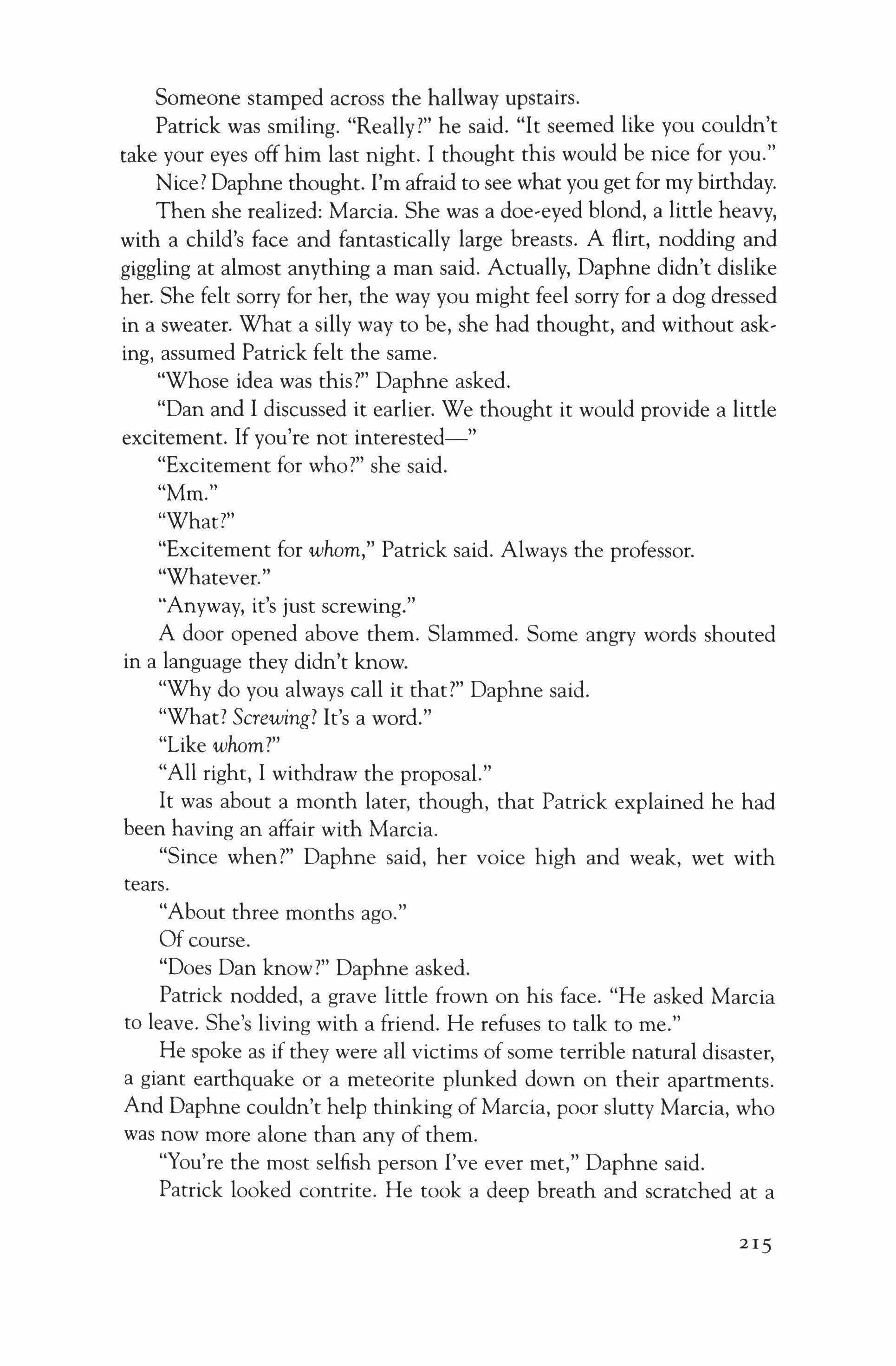
Someone stamped across the hallway upstairs.
Patrick was smiling. "Really?" he said. "It seemed like you couldn't take your eyes off him last night. I thought this would be nice for you."
Nice? Daphne thought. I'm afraid to see what you get for my birthday. Then she realized: Marcia. She was a doe-eyed blond, a little heavy, with a child's face and fantastically large breasts. A flirt, nodding and giggling at almost anything a man said. Actually, Daphne didn't dislike her. She felt sorry for her, the way you might feel sorry for a dog dressed in a sweater. What a silly way to be, she had thought, and without asking, assumed Patrick felt the same.
"Whose idea was this?" Daphne asked.
"Dan and I discussed it earlier. We thought it would provide a little excitement. If you're not interested-"
"Excitement for who?" she said.
"Mm."
"What?"
"Excitement for whom," Patrick said. Always the professor. "Whatever."
"Anyway, it's just screwing."
A door opened above them. Slammed. Some angry words shouted in a language they didn't know.
"Why do you always call it that?" Daphne said.
"What? Screwing? It's a word."
"Like whom?"
"All right, I withdraw the proposal."
It was about a month later, though, that Patrick explained he had been having an affair with Marcia.
"Since when?" Daphne said, her voice high and weak, wet with tears.
"About three months ago."
Of course.
"Does Dan know?" Daphne asked.
Patrick nodded, a grave little frown on his face. "He asked Marcia to leave. She's living with a friend. He refuses to talk to me."
He spoke as if they were all victims of some terrible natural disaster, a giant earthquake or a meteorite plunked down on their apartments. And Daphne couldn't help thinking of Marcia, poor slutty Marcia, who was now more alone than any of them.
"You're the most selfish person I've ever met," Daphne said.
Patrick looked contrite. He took a deep breath and scratched at a
215
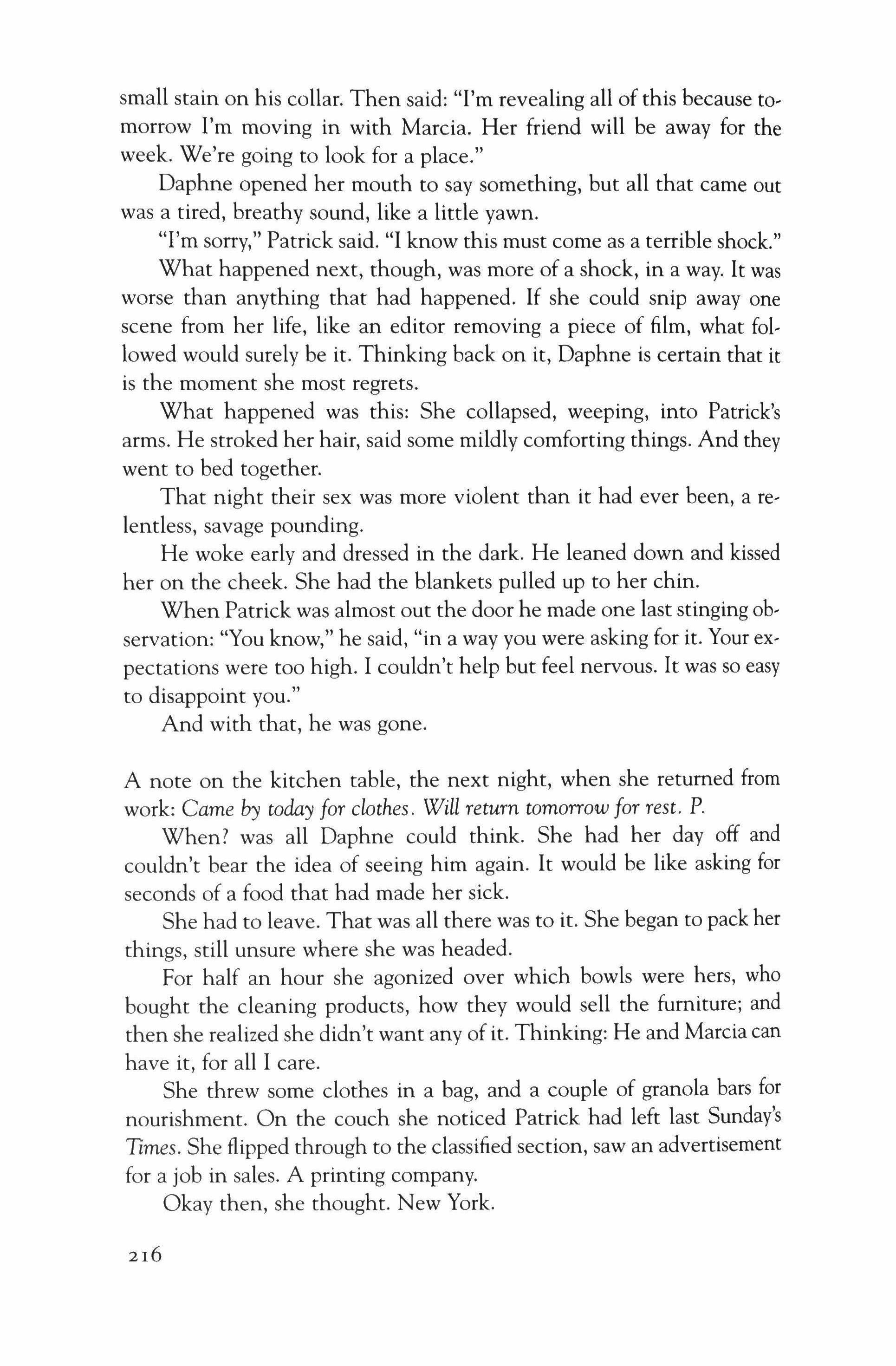
small stain on his collar. Then said: "I'm revealing all of this because tomorrow I'm moving in with Marcia. Her friend will be away for the week. We're going to look for a place."
Daphne opened her mouth to say something, but all that came out was a tired, breathy sound, like a little yawn.
"I'm sorry," Patrick said. "I know this must come as a terrible shock."
What happened next, though, was more of a shock, in a way. It was worse than anything that had happened. If she could snip away one scene from her life, like an editor removing a piece of film, what followed would surely be it. Thinking back on it, Daphne is certain that it is the moment she most regrets.
What happened was this: She collapsed, weeping, into Patrick's arms. He stroked her hair, said some mildly comforting things. And they went to bed together.
That night their sex was more violent than it had ever been, a relentless, savage pounding.
He woke early and dressed in the dark. He leaned down and kissed her on the cheek. She had the blankets pulled up to her chin.
When Patrick was almost out the door he made one last stinging observation: "You know," he said, "in a way you were asking for it. Your expectations were too high. I couldn't help but feel nervous. It was so easy to disappoint you."
And with that, he was gone.
A note on the kitchen table, the next night, when she returned from work: Came by today for clothes. Will return tomorrow for rest. P.
When? was all Daphne could think. She had her day off and couldn't bear the idea of seeing him again. It would be like asking for seconds of a food that had made her sick.
She had to leave. That was all there was to it. She began to pack her things, still unsure where she was headed.
For half an hour she agonized over which bowls were hers, who bought the cleaning products, how they would sell the furniture; and then she realized she didn't want any of it. Thinking: He and Marcia can have it, for all I care.
She threw some clothes in a bag, and a couple of granola bars for nourishment. On the couch she noticed Patrick had left last Sunday's Times. She flipped through to the classified section, saw an advertisement for a job in sales. A printing company.
Okay then, she thought. New York.
216
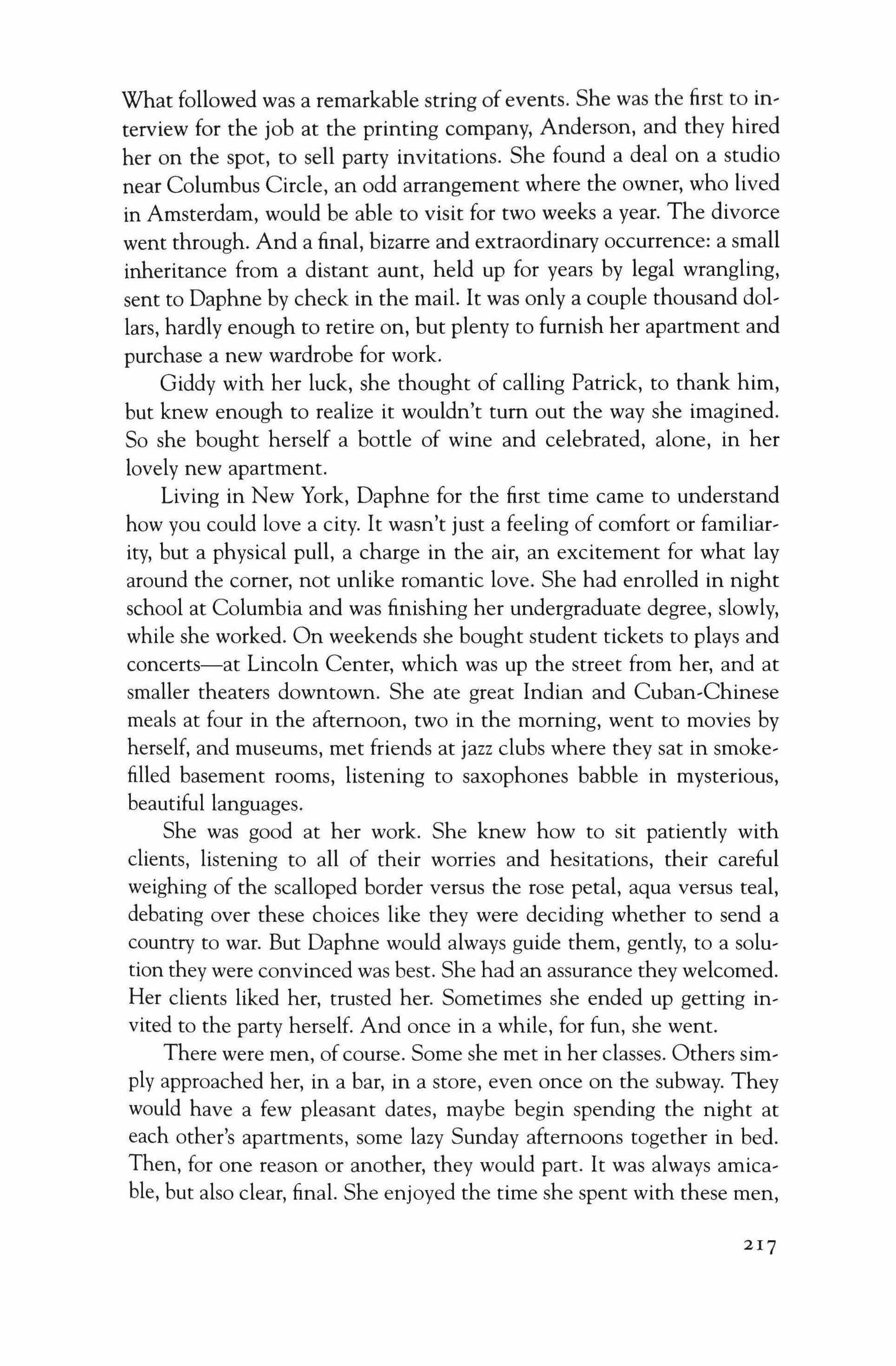
What followed was a remarkable string of events. She was the first to in' terview for the job at the printing company, Anderson, and they hired her on the spot, to sell party invitations. She found a deal on a studio near Columbus Circle, an odd arrangement where the owner, who lived in Amsterdam, would be able to visit for two weeks a year. The divorce went through. And a final, bizarre and extraordinary occurrence: a small inheritance from a distant aunt, held up for years by legal wrangling, sent to Daphne by check in the mail. It was only a couple thousand dol, lars, hardly enough to retire on, but plenty to furnish her apartment and purchase a new wardrobe for work.
Giddy with her luck, she thought of calling Patrick, to thank him, but knew enough to realize it wouldn't tum out the way she imagined. So she bought herself a bottle of wine and celebrated, alone, in her lovely new apartment.
Living in New York, Daphne for the first time came to understand how you could love a city. It wasn't just a feeling of comfort or familiar' ity, but a physical pull, a charge in the air, an excitement for what lay around the comer, not unlike romantic love. She had enrolled in night school at Columbia and was finishing her undergraduate degree, slowly, while she worked. On weekends she bought student tickets to plays and concerts-at Lincoln Center, which was up the street from her, and at smaller theaters downtown. She ate great Indian and Cuban-Chinese meals at four in the afternoon, two in the morning, went to movies by herself, and museums, met friends at jazz clubs where they sat in smokefilled basement rooms, listening to saxophones babble in mysterious, beautiful languages.
She was good at her work. She knew how to sit patiently with clients, listening to all of their worries and hesitations, their careful weighing of the scalloped border versus the rose petal, aqua versus teal, debating over these choices like they were deciding whether to send a country to war. But Daphne would always guide them, gently, to a solution they were convinced was best. She had an assurance they welcomed. Her clients liked her, trusted her. Sometimes she ended up getting invited to the party herself. And once in a while, for fun, she went.
There were men, of course. Some she met in her classes. Others simply approached her, in a bar, in a store, even once on the subway. They would have a few pleasant dates, maybe begin spending the night at each other's apartments, some lazy Sunday afternoons together in bed. Then, for one reason or another, they would part. It was always arnica' ble, but also clear, final. She enjoyed the time she spent with these men,
217
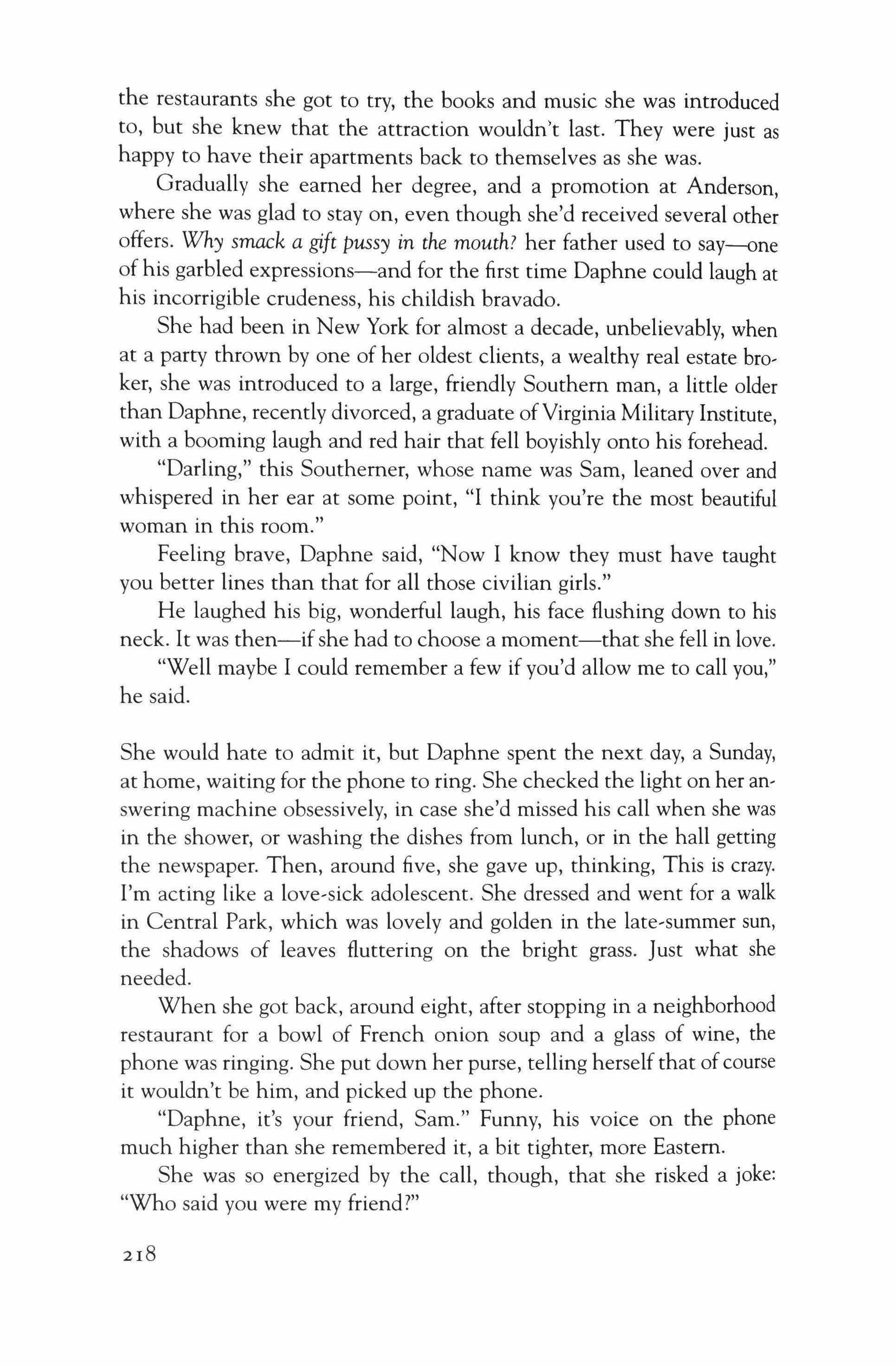
the restaurants she got to try, the books and music she was introduced to, but she knew that the attraction wouldn't last. They were just as happy to have their apartments back to themselves as she was.
Gradually she earned her degree, and a promotion at Anderson, where she was glad to stay on, even though she'd received several other offers. Why smack a gift pussy in the mouth? her father used to say-one of his garbled expressions-and for the first time Daphne could laugh at his incorrigible crudeness, his childish bravado.
She had been in New York for almost a decade, unbelievably, when at a party thrown by one of her oldest clients, a wealthy real estate broker, she was introduced to a large, friendly Southern man, a little older than Daphne, recently divorced, a graduate ofVirginia Military Institute, with a booming laugh and red hair that fell boyishly onto his forehead.
"Darling," this Southerner, whose name was Sam, leaned over and whispered in her ear at some point, "I think you're the most beautiful woman in this room."
Feeling brave, Daphne said, "Now I know they must have taught you better lines than that for all those civilian girls."
He laughed his big, wonderful laugh, his face flushing down to his neck. It was then-ifshe had to choose a moment-that she fell in love.
"Well maybe I could remember a few if you'd allow me to call you," he said.
She would hate to admit it, but Daphne spent the next day, a Sunday, at home, waiting for the phone to ring. She checked the light on her answering machine obsessively, in case she'd missed his call when she was in the shower, or washing the dishes from lunch, or in the hall getting the newspaper. Then, around five, she gave up, thinking, This is crazy. I'm acting like a love-sick adolescent. She dressed and went for a walk in Central Park, which was lovely and golden in the late-summer sun, the shadows of leaves fluttering on the bright grass. Just what she needed.
When she got back, around eight, after stopping in a neighborhood restaurant for a bowl of French onion soup and a glass of wine, the phone was ringing. She put down her purse, telling herself that of course it wouldn't be him, and picked up the phone.
"Daphne, it's your friend, Sam." Funny, his voice on the phone much higher than she remembered it, a bit tighter, more Eastern. She was so energized by the call, though, that she risked a joke: "Who said you were my friend?"
218
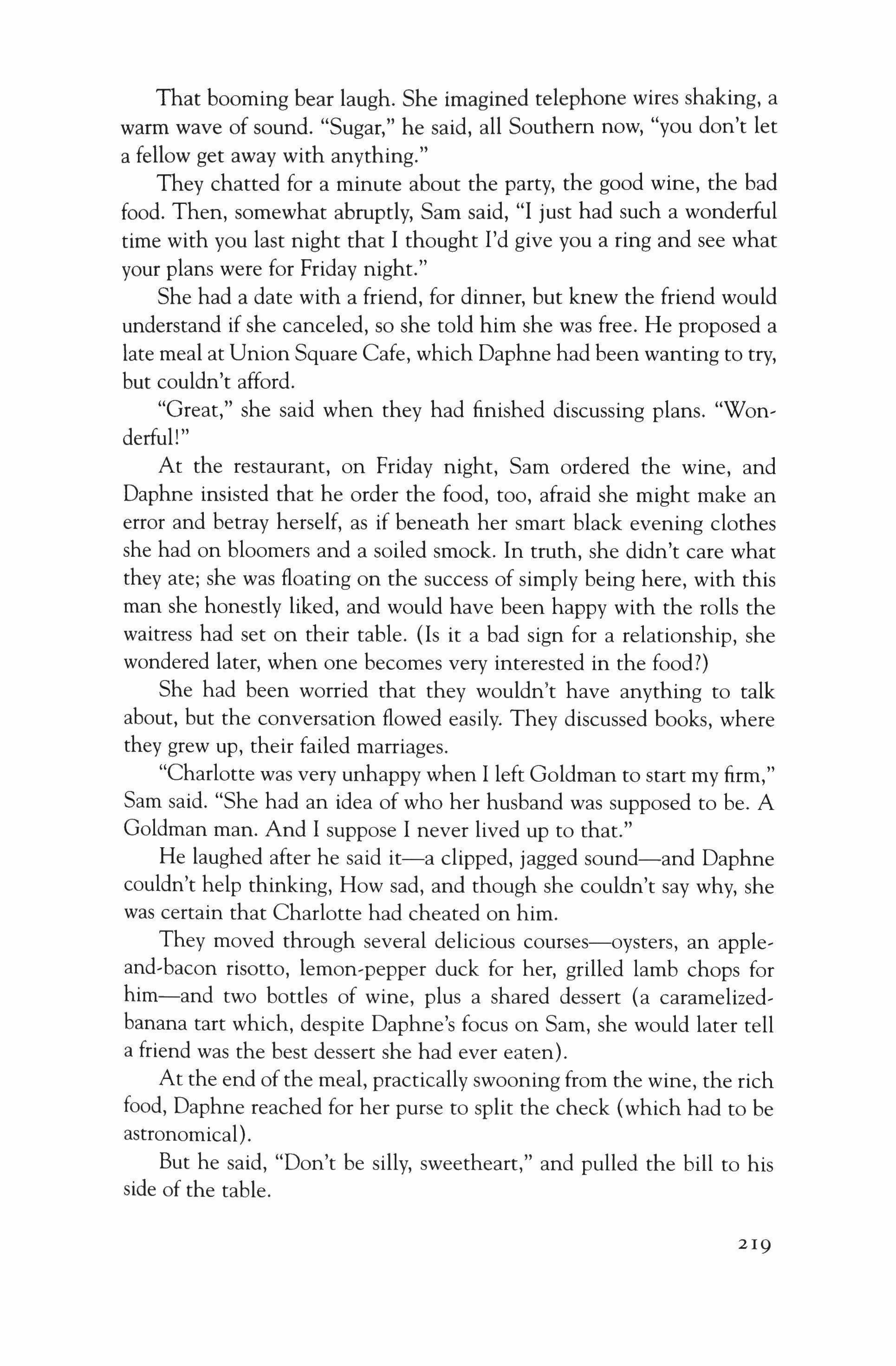
That booming bear laugh. She imagined telephone wires shaking, a warm wave of sound. "Sugar," he said, all Southern now, "you don't let a fellow get away with anything."
They chatted for a minute about the party, the good wine, the bad food. Then, somewhat abruptly, Sam said, "I just had such a wonderful time with you last night that I thought I'd give you a ring and see what your plans were for Friday night."
She had a date with a friend, for dinner, but knew the friend would understand if she canceled, so she told him she was free. He proposed a late meal at Union Square Cafe, which Daphne had been wanting to try, but couldn't afford.
"Great," she said when they had finished discussing plans. "Won� derfull"
At the restaurant, on Friday night, Sam ordered the wine, and Daphne insisted that he order the food, too, afraid she might make an error and betray herself, as if beneath her smart black evening clothes she had on bloomers and a soiled smock. In truth, she didn't care what they ate; she was floating on the success of simply being here, with this man she honestly liked, and would have been happy with the rolls the waitress had set on their table. (Is it a bad sign for a relationship, she wondered later, when one becomes very interested in the food?)
She had been worried that they wouldn't have anything to talk about, but the conversation flowed easily. They discussed books, where they grew up, their failed marriages.
"Charlotte was very unhappy when I left Goldman to start my firm," Sam said. "She had an idea of who her husband was supposed to be. A Goldman man. And I suppose I never lived up to that."
He laughed after he said it-a clipped, jagged sound-and Daphne couldn't help thinking, How sad, and though she couldn't say why, she was certain that Charlotte had cheated on him.
They moved through several delicious courses-oysters, an appleand-bacon risotto, lemon-pepper duck for her, grilled lamb chops for him-and two bottles of wine, plus a shared dessert (a caramelizedbanana tart which, despite Daphne's focus on Sam, she would later tell a friend was the best dessert she had ever eaten).
At the end of the meal, practically swooning from the wine, the rich food, Daphne reached for her purse to split the check (which had to be astronomical)
But he said, "Don't be silly, sweetheart," and pulled the bill to his side of the table.
219
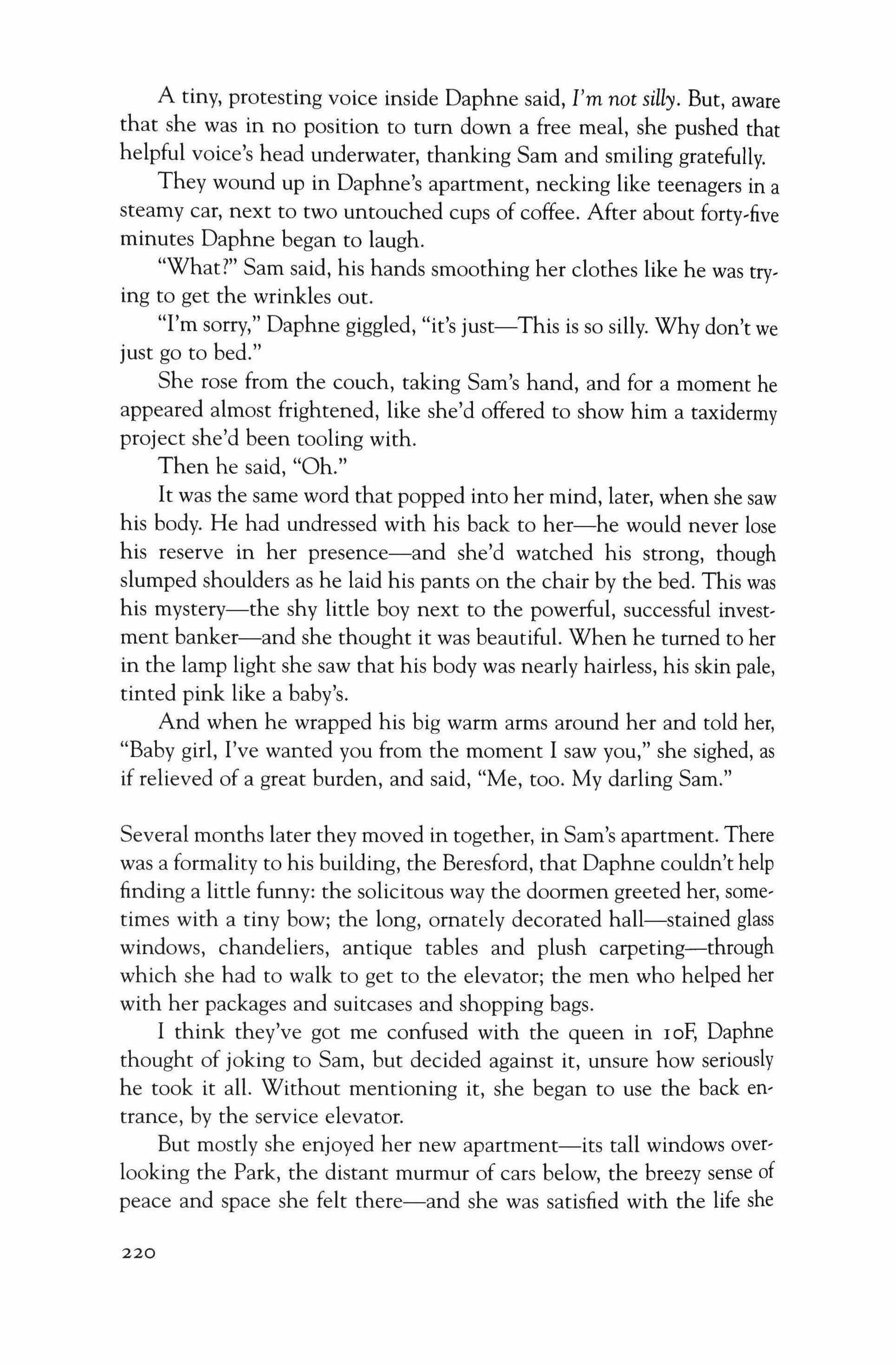
A tiny, protesting voice inside Daphne said, I'm not silly. But, aware that she was in no position to turn down a free meal, she pushed that helpful voice's head underwater, thanking Sam and smiling gratefully.
They wound up in Daphne's apartment, necking like teenagers in a steamy car, next to two untouched cups of coffee. After about forty-five minutes Daphne began to laugh.
"What?" Sam said, his hands smoothing her clothes like he was trying to get the wrinkles out.
"I'm sorry," Daphne giggled, "it's just-This is so silly. Why don't we just go to bed."
She rose from the couch, taking Sam's hand, and for a moment he appeared almost frightened, like she'd offered to show him a taxidermy project she'd been tooling with.
Then he said, "Oh."
It was the same word that popped into her mind, later, when she saw his body. He had undressed with his back to her-he would never lose his reserve in her presence-and she'd watched his strong, though slumped shoulders as he laid his pants on the chair by the bed. This was his mystery-the shy little boy next to the powerful, successful investment banker-and she thought it was beautiful. When he turned to her in the lamp light she saw that his body was nearly hairless, his skin pale, tinted pink like a baby's.
And when he wrapped his big warm arms around her and told her, "Baby girl, I've wanted you from the moment I saw you," she sighed, as if relieved of a great burden, and said, "Me, too. My darling Sam."
Several months later they moved in together, in Sam's apartment. There was a formality to his building, the Beresford, that Daphne couldn't help finding a little funny: the solicitous way the doormen greeted her, sometimes with a tiny bow; the long, ornately decorated hall-stained glass windows, chandeliers, antique tables and plush carpeting-through which she had to walk to get to the elevator; the men who helped her with her packages and suitcases and shopping bags.
I think they've got me confused with the queen in I of, Daphne thought of joking to Sam, but decided against it, unsure how seriously he took it all. Without mentioning it, she began to use the back entrance, by the service elevator.
But mostly she enjoyed her new apartment-its tall windows overlooking the Park, the distant murmur of cars below, the breezy sense of peace and space she felt there-and she was satisfied with the life she
220
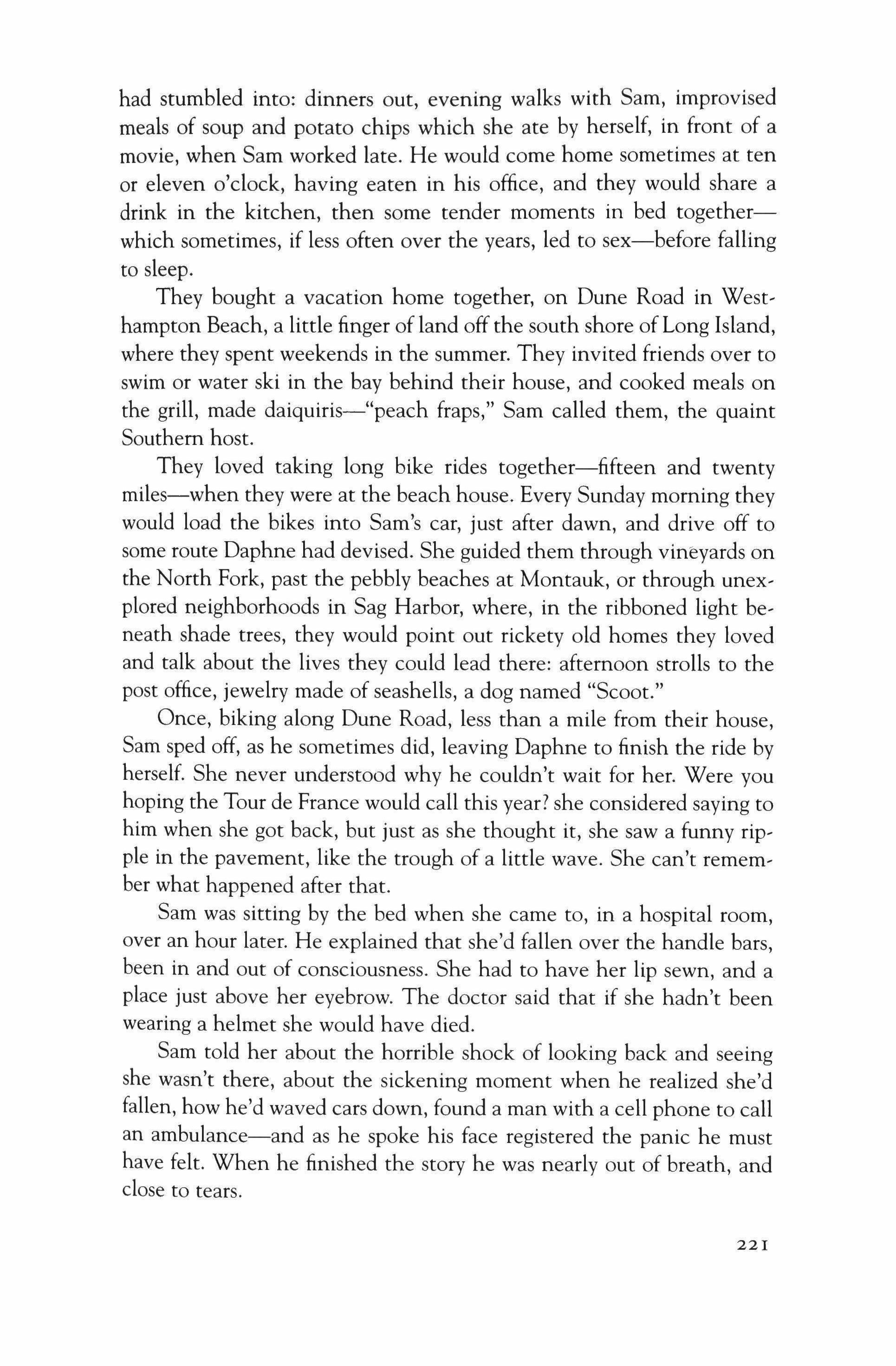
had stumbled into: dinners out, evening walks with Sam, improvised meals of soup and potato chips which she ate by herself, in front of a movie, when Sam worked late. He would come home sometimes at ten or eleven o'clock, having eaten in his office, and they would share a drink in the kitchen, then some tender moments in bed togetherwhich sometimes, if less often over the years, led to sex-before falling to sleep.
They bought a vacation home together, on Dune Road in Westhampton Beach, a little finger of land off the south shore of Long Island, where they spent weekends in the summer. They invited friends over to swim or water ski in the bay behind their house, and cooked meals on the grill, made daiquiris-"peach fraps," Sam called them, the quaint Southern host.
They loved taking long bike rides together-fifteen and twenty miles-when they were at the beach house. Every Sunday morning they would load the bikes into Sam's car, just after dawn, and drive off to some route Daphne had devised. She guided them through vineyards on the North Fork, past the pebbly beaches at Montauk, or through unexplored neighborhoods in Sag Harbor, where, in the ribboned light beneath shade trees, they would point out rickety old homes they loved and talk about the lives they could lead there: afternoon strolls to the post office, jewelry made of seashells, a dog named "Scoot."
Once, biking along Dune Road, less than a mile from their house, Sam sped off, as he sometimes did, leaving Daphne to finish the ride by herself. She never understood why he couldn't wait for her. Were you hoping the Tour de France would call this year? she considered saying to him when she got back, but just as she thought it, she saw a funny ripple in the pavement, like the trough of a little wave. She can't remember what happened after that.
Sam was sitting by the bed when she came to, in a hospital room, over an hour later. He explained that she'd fallen over the handle bars, been in and out of consciousness. She had to have her lip sewn, and a place just above her eyebrow. The doctor said that if she hadn't been wearing a helmet she would have died.
Sam told her about the horrible shock of looking back and seeing she wasn't there, about the sickening moment when he realized she'd fallen, how he'd waved cars down, found a man with a cell phone to call an ambulance-and as he spoke his face registered the panic he must have felt. When he finished the story he was nearly out of breath, and close to tears.
221
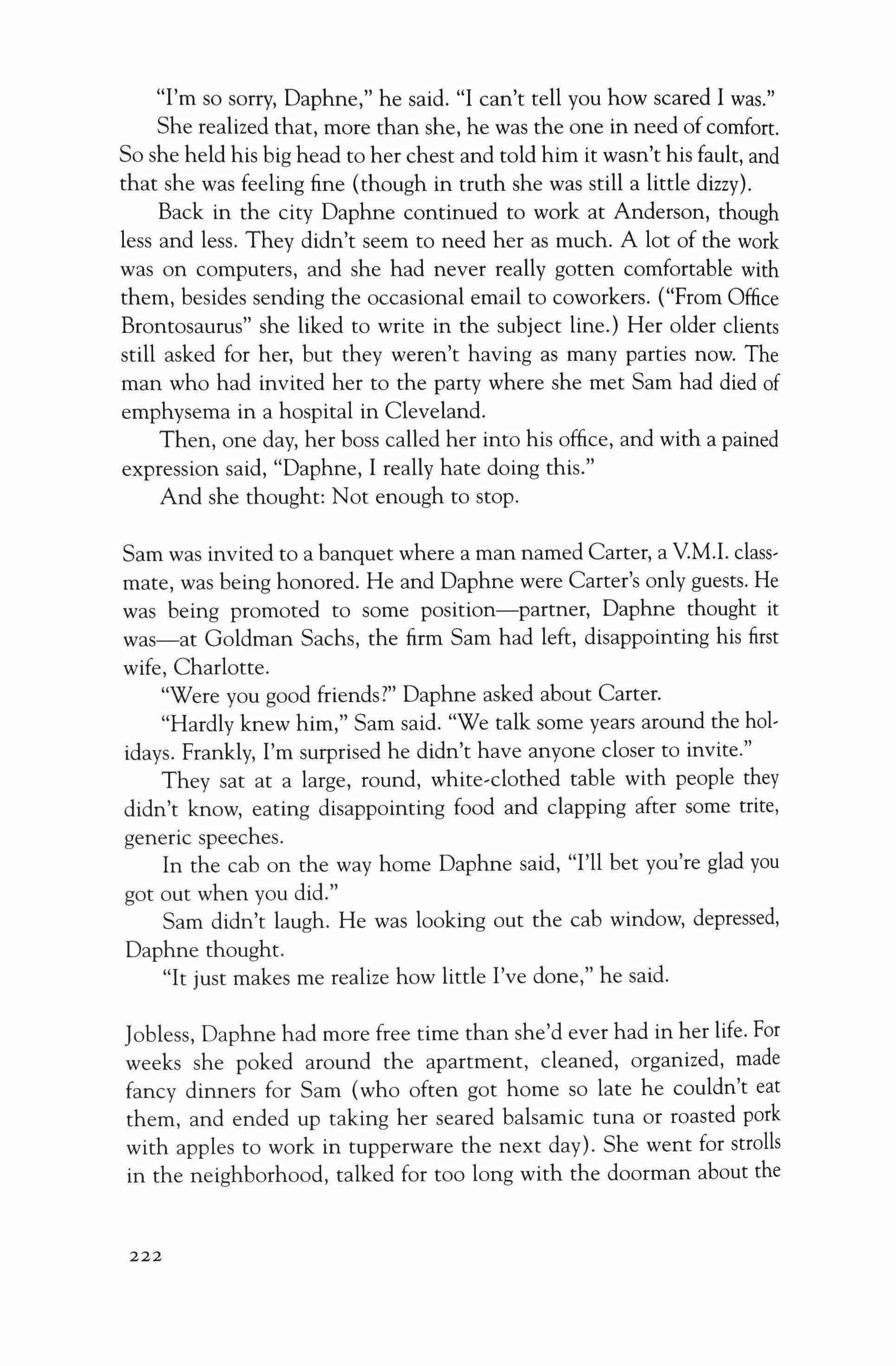
"I'm so sorry, Daphne," he said. "I can't tell you how scared I was."
She realized that, more than she, he was the one in need of comfort. So she held his big head to her chest and told him it wasn't his fault, and that she was feeling fine (though in truth she was still a little dizzy).
Back in the city Daphne continued to work at Anderson, though less and less. They didn't seem to need her as much. A lot of the work was on computers, and she had never really gotten comfortable with them, besides sending the occasional email to coworkers. ("From Office Brontosaurus" she liked to write in the subject line.) Her older clients still asked for her, but they weren't having as many parties now. The man who had invited her to the party where she met Sam had died of emphysema in a hospital in Cleveland.
Then, one day, her boss called her into his office, and with a pained expression said, "Daphne, I really hate doing this."
And she thought: Not enough to stop.
Sam was invited to a banquet where a man named Carter, a Y.M.I. classmate, was being honored. He and Daphne were Carter's only guests. He was being promoted to some position-partner, Daphne thought it was-at Goldman Sachs, the firm Sam had left, disappointing his first wife, Charlotte.
"Were you good friends?" Daphne asked about Carter.
"Hardly knew him," Sam said. "We talk some years around the holidays. Frankly, I'm surprised he didn't have anyone closer to invite."
They sat at a large, round, white-clothed table with people they didn't know, eating disappointing food and clapping after some trite, generic speeches.
In the cab on the way home Daphne said, "I'll bet you're glad you got out when you did."
Sam didn't laugh. He was looking out the cab window, depressed, Daphne thought.
"It just makes me realize how little I've done," he said.
Jobless, Daphne had more free time than she'd ever had in her life. For weeks she poked around the apartment, cleaned, organized, made fancy dinners for Sam (who often got home so late he couldn't eat them, and ended up taking her seared balsamic tuna or roasted pork with apples to work in tupperware the next day). She went for strolls in the neighborhood, talked for too long with the doorman about the
222
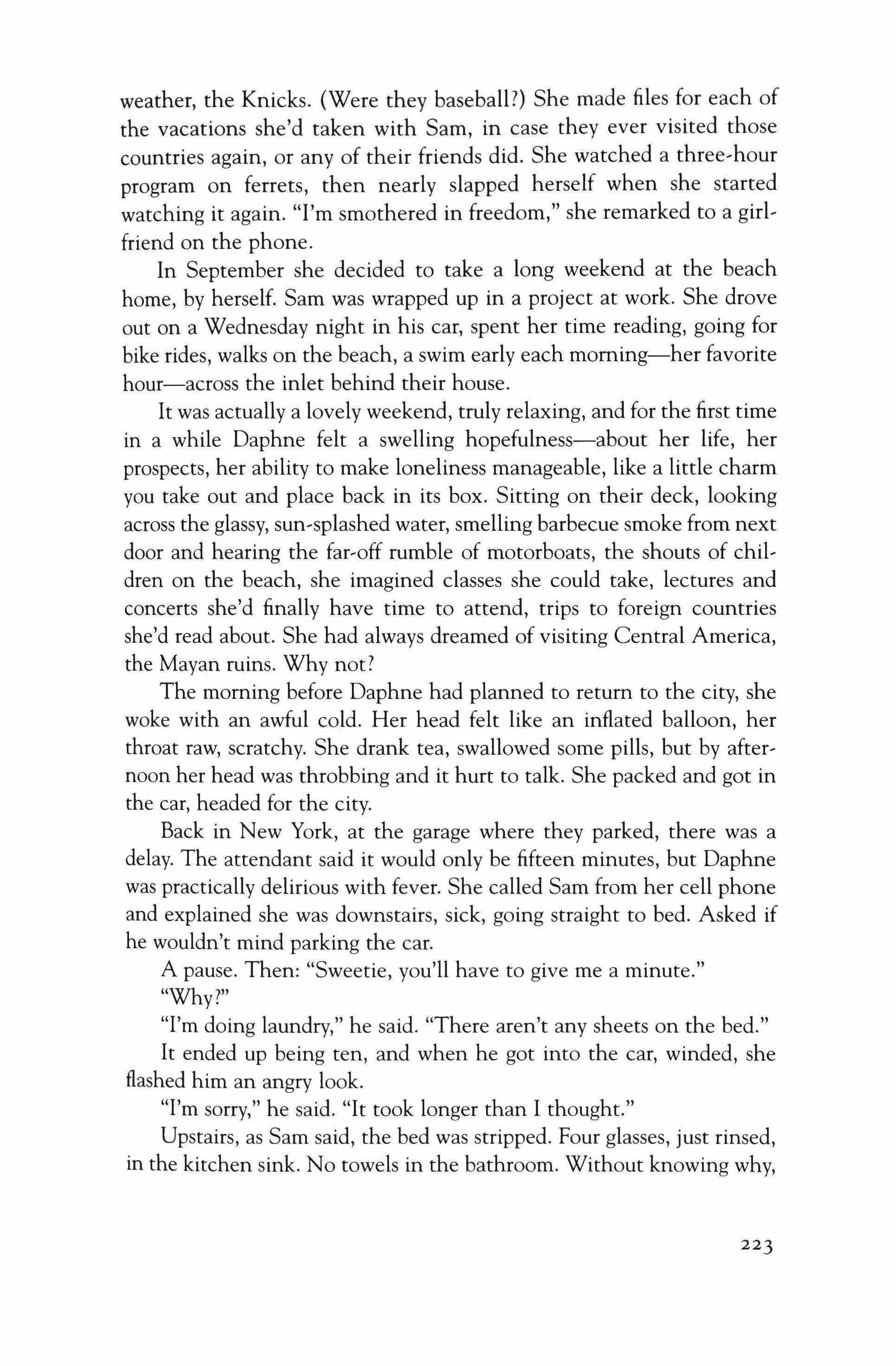
weather, the Knicks. (Were they baseball?) She made files for each of the vacations she'd taken with Sam, in case they ever visited those countries again, or any of their friends did. She watched a three-hour program on ferrets, then nearly slapped herself when she started watching it again. "I'm smothered in freedom," she remarked to a girl, friend on the phone.
In September she decided to take a long weekend at the beach home, by herself. Sam was wrapped up in a project at work. She drove out on a Wednesday night in his car, spent her time reading, going for bike rides, walks on the beach, a swim early each morning-her favorite hour-across the inlet behind their house.
It was actually a lovely weekend, truly relaxing, and for the first time in a while Daphne felt a swelling hopefulness-about her life, her prospects, her ability to make loneliness manageable, like a little charm you take out and place back in its box. Sitting on their deck, looking across the glassy, sun,splashed water, smelling barbecue smoke from next door and hearing the far-off rumble of motorboats, the shouts of children on the beach, she imagined classes she could take, lectures and concerts she'd finally have time to attend, trips to foreign countries she'd read about. She had always dreamed of visiting Central America, the Mayan ruins. Why not?
The morning before Daphne had planned to return to the city, she woke with an awful cold. Her head felt like an inflated balloon, her throat raw, scratchy. She drank tea, swallowed some pills, but by after, noon her head was throbbing and it hurt to talk. She packed and got in the car, headed for the city.
Back in New York, at the garage where they parked, there was a delay. The attendant said it would only be fifteen minutes, but Daphne was practically delirious with fever. She called Sam from her cell phone and explained she was downstairs, sick, going straight to bed. Asked if he wouldn't mind parking the car.
A pause. Then: "Sweetie, you'll have to give me a minute."
"Why?"
"I'm doing laundry," he said. "There aren't any sheets on the bed."
It ended up being ten, and when he got into the car, winded, she flashed him an angry look.
"I'm sorry," he said. "It took longer than I thought."
Upstairs, as Sam said, the bed was stripped. Four glasses, just rinsed, in the kitchen sink. No towels in the bathroom. Without knowing why,
223
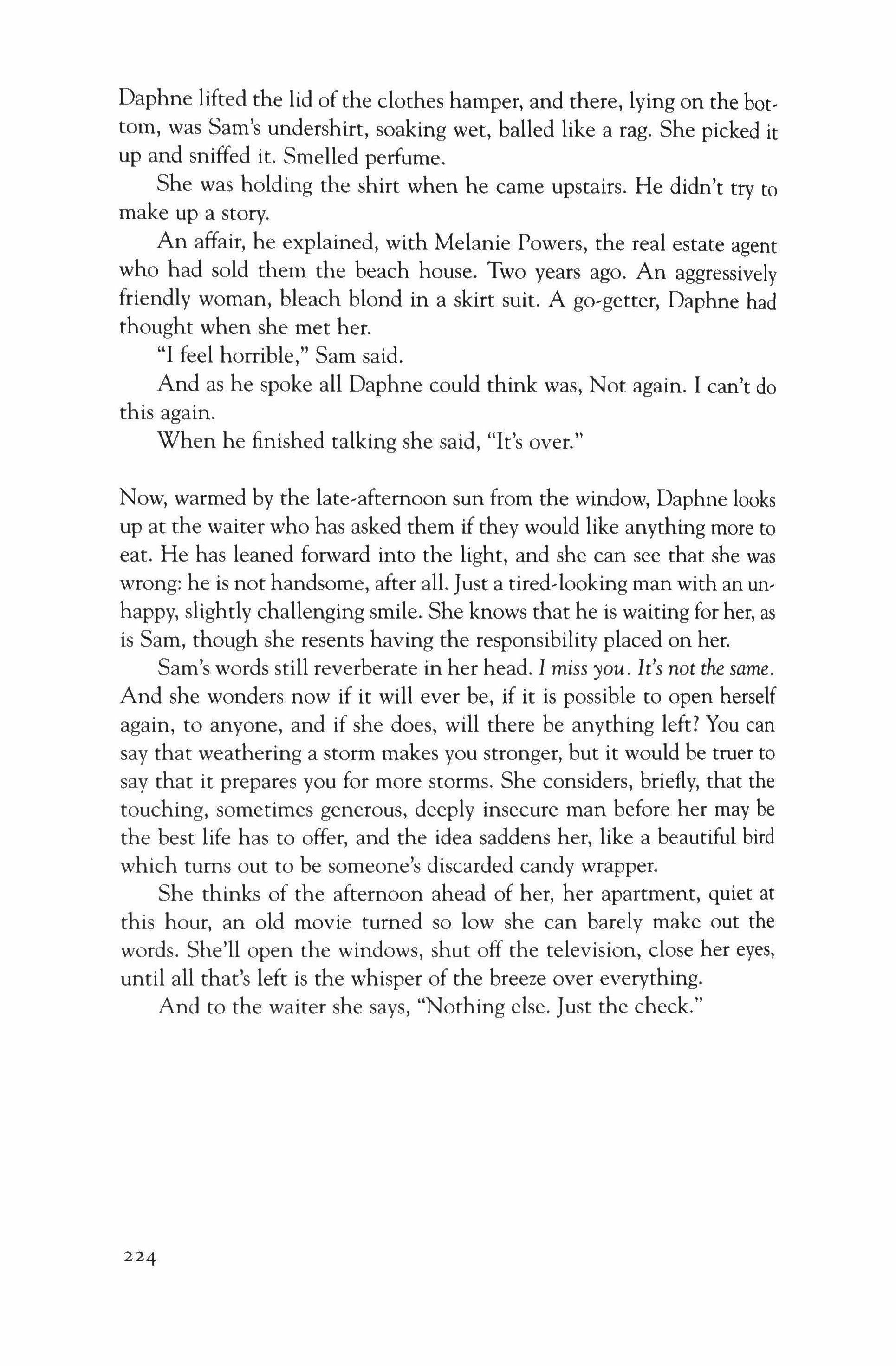
Daphne lifted the lid of the clothes hamper, and there, lying on the bottom, was Sam's undershirt, soaking wet, balled like a rag. She picked it up and sniffed it. Smelled perfume.
She was holding the shirt when he came upstairs. He didn't try to make up a story.
An affair, he explained, with Melanie Powers, the real estate agent who had sold them the beach house. Two years ago. An aggressively friendly woman, bleach blond in a skirt suit. A go-getter, Daphne had thought when she met her.
"I feel horrible," Sam said.
And as he spoke all Daphne could think was, Not again. I can't do this again.
When he finished talking she said, "It's over."
Now, warmed by the late-afternoon sun from the window, Daphne looks up at the waiter who has asked them if they would like anything more to eat. He has leaned forward into the light, and she can see that she was wrong: he is not handsome, after all. Just a tired-looking man with an unhappy, slightly challenging smile. She knows that he is waiting for her, as is Sam, though she resents having the responsibility placed on her.
Sam's words still reverberate in her head. I miss you. It's not the same. And she wonders now if it will ever be, if it is possible to open herself again, to anyone, and if she does, will there be anything left? You can say that weathering a storm makes you stronger, but it would be truer to say that it prepares you for more storms. She considers, briefly, that the touching, sometimes generous, deeply insecure man before her may be the best life has to offer, and the idea saddens her, like a beautiful bird which turns out to be someone's discarded candy wrapper.
She thinks of the afternoon ahead of her, her apartment, quiet at this hour, an old movie turned so low she can barely make out the words. She'll open the windows, shut off the television, close her eyes, until all that's left is the whisper of the breeze over everything.
And to the waiter she says, "Nothing else. Just the check."
224
William Giraldi
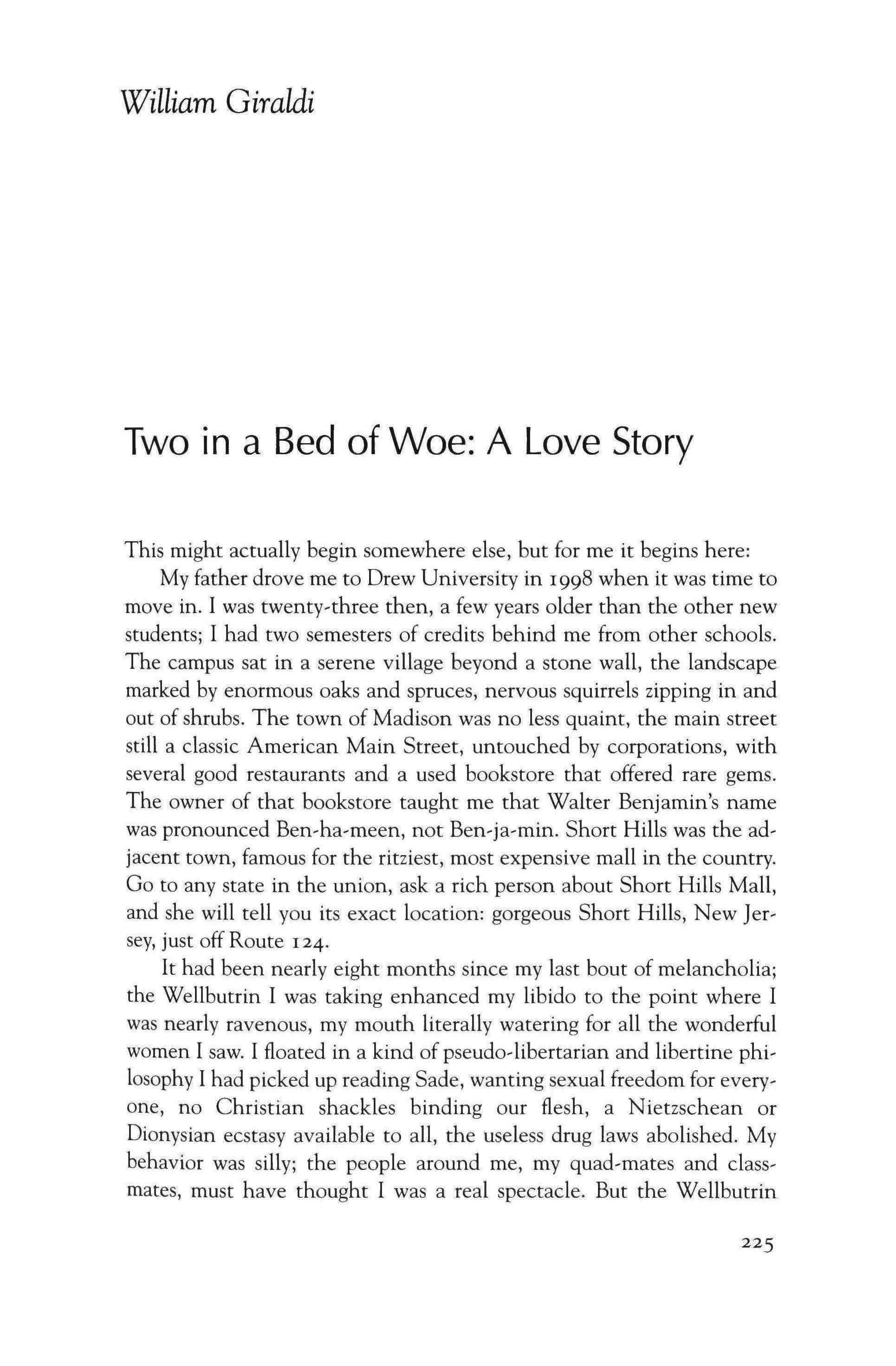
Two in a Bed of Woe: A Love Story
This might actually begin somewhere else, but for me it begins here:
My father drove me to Drew University in 1998 when it was time to move in. I was twenty-three then, a few years older than the other new students; I had two semesters of credits behind me from other schools. The campus sat in a serene village beyond a stone wall, the landscape marked by enormous oaks and spruces, nervous squirrels zipping in and out of shrubs. The town of Madison was no less quaint, the main street still a classic American Main Street, untouched by corporations, with several good restaurants and a used bookstore that offered rare gems. The owner of that bookstore taught me that Walter Benjamin's name was pronounced Ben-ha-meen, not Ben-ja-min. Short Hills was the adjacent town, famous for the ritziest, most expensive mall in the country. Go to any state in the union, ask a rich person about Short Hills Mall, and she will tell you its exact location: gorgeous Short Hills, New [ersey, just off Route 124.
It had been nearly eight months since my last bout of melancholia; the Wellbutrin I was taking enhanced my libido to the point where I was nearly ravenous, my mouth literally watering for all the wonderful women I saw. I floated in a kind of pseudo-libertarian and libertine philosophy I had picked up reading Sade, wanting sexual freedom for everyone, no Christian shackles binding our flesh, a Nietzschean or Dionysian ecstasy available to all, the useless drug laws abolished. My behavior was silly; the people around me, my quad-mates and classmates, must have thought I was a real spectacle. But the Wellbutrin
225
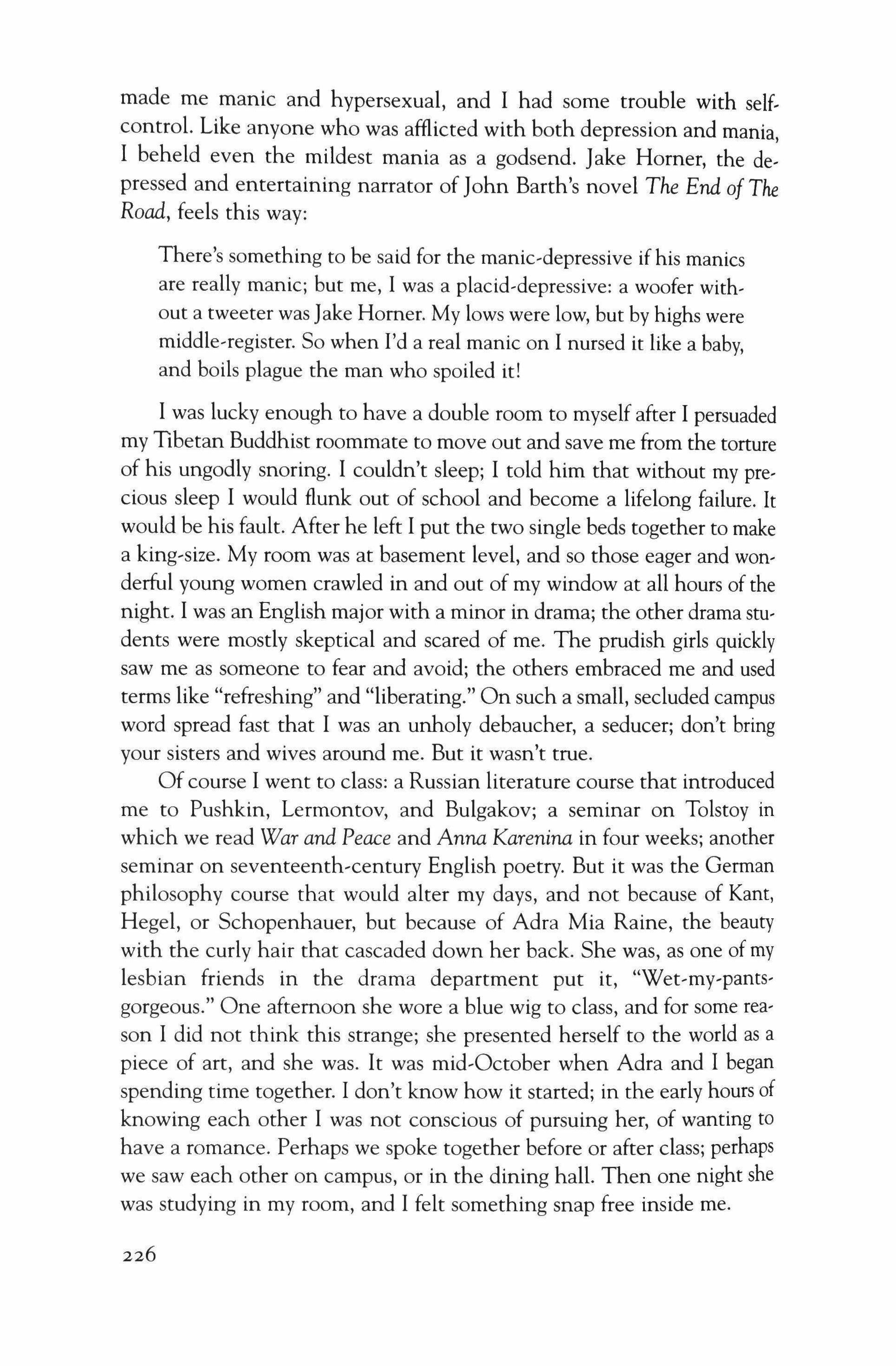
made me manic and hypersexual, and I had some trouble with selfcontrol. Like anyone who was afflicted with both depression and mania, I beheld even the mildest mania as a godsend. Jake Horner, the depressed and entertaining narrator of John Barth's novel The End of The Road, feels this way:
There's something to be said for the manic-depressive if his manics are really manic; but me, I was a placid-depressive: a woofer without a tweeter was Jake Horner. My lows were low, but by highs were middle-register. So when I'd a real manic on I nursed it like a baby, and boils plague the man who spoiled it!
I was lucky enough to have a double room to myself after I persuaded my Tibetan Buddhist roommate to move out and save me from the torture of his ungodly snoring. I couldn't sleep; I told him that without my precious sleep I would flunk out of school and become a lifelong failure. It would be his fault. After he left I put the two single beds together to make a king-size. My room was at basement level, and so those eager and wonderful young women crawled in and out of my window at all hours of the night. I was an English major with a minor in drama; the other drama students were mostly skeptical and scared of me. The prudish girls quickly saw me as someone to fear and avoid; the others embraced me and used terms like "refreshing" and "liberating." On such a small, secluded campus word spread fast that I was an unholy debaucher, a seducer; don't bring your sisters and wives around me. But it wasn't true.
Of course I went to class: a Russian literature course that introduced me to Pushkin, Lermontov, and Bulgakov; a seminar on Tolstoy in which we read War and Peace and Anna Karenina in four weeks; another seminar on seventeenth-century English poetry. But it was the German philosophy course that would alter my days, and not because of Kant, Hegel, or Schopenhauer, but because of Adra Mia Raine, the beauty with the curly hair that cascaded down her back. She was, as one of my lesbian friends in the drama department put it, "Wet-my-pantsgorgeous." One afternoon she wore a blue wig to class, and for some reason I did not think this strange; she presented herself to the world as a piece of art, and she was. It was mid-October when Adra and I began spending time together. I don't know how it started; in the early hours of knowing each other I was not conscious of pursuing her, of wanting to have a romance. Perhaps we spoke together before or after class; perhaps we saw each other on campus, or in the dining hall. Then one night she was studying in my room, and I felt something snap free inside me.
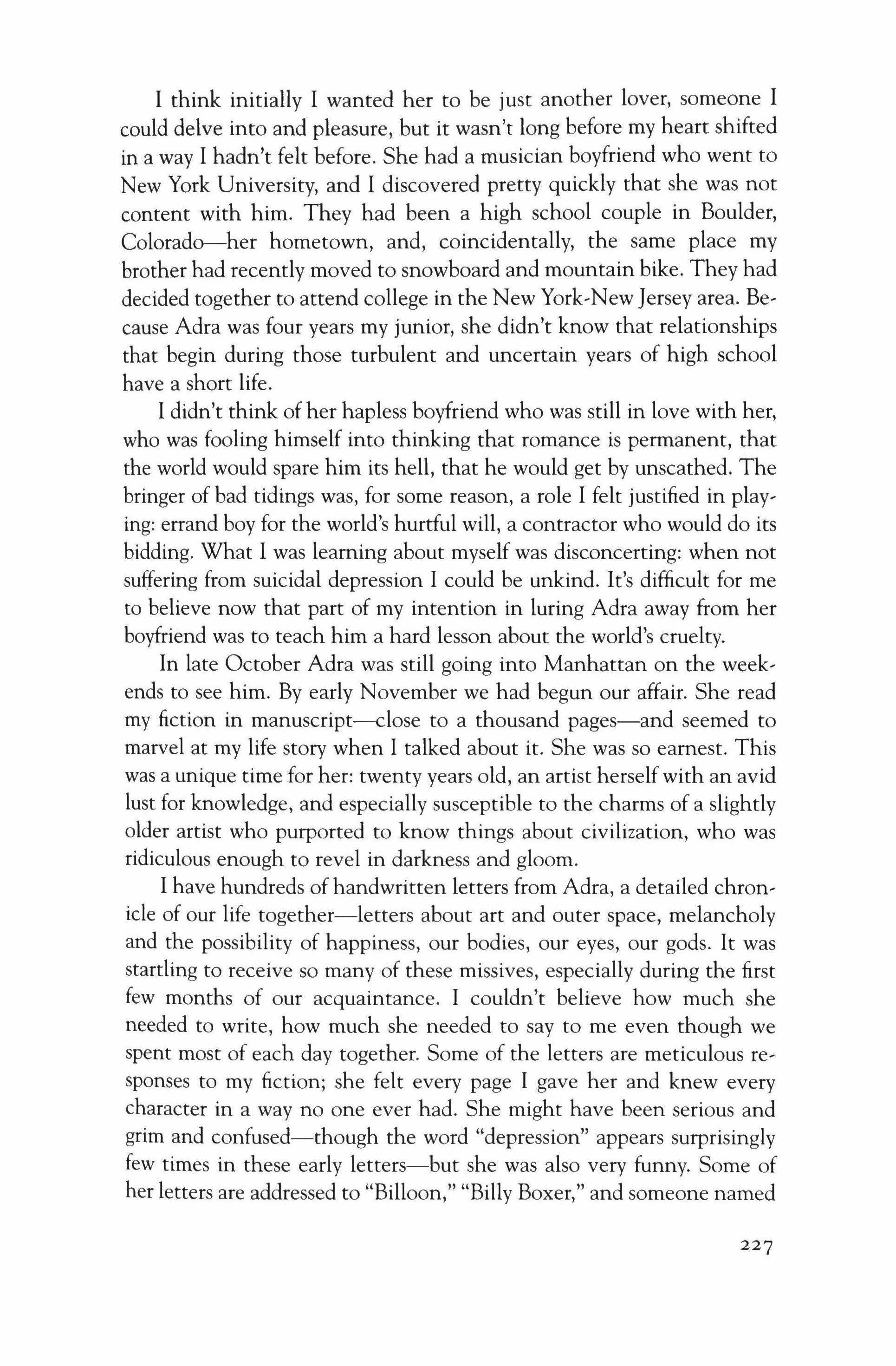
I think initially I wanted her to be just another lover, someone I could delve into and pleasure, but it wasn't long before my heart shifted in a way I hadn't felt before. She had a musician boyfriend who went to New York University, and I discovered pretty quickly that she was not content with him. They had been a high school couple in Boulder, Colorado-her hometown, and, coincidentally, the same place my brother had recently moved to snowboard and mountain bike. They had decided together to attend college in the New York-New Jersey area. Because Adra was four years my junior, she didn't know that relationships that begin during those turbulent and uncertain years of high school have a short life.
I didn't think of her hapless boyfriend who was still in love with her, who was fooling himself into thinking that romance is permanent, that the world would spare him its hell, that he would get by unscathed. The bringer of bad tidings was, for some reason, a role I felt justified in playing: errand boy for the world's hurtful will, a contractor who would do its bidding. What I was learning about myself was disconcerting: when not suffering from suicidal depression I could be unkind. It's difficult for me to believe now that part of my intention in luring Adra away from her boyfriend was to teach him a hard lesson about the world's cruelty.
In late October Adra was still going into Manhattan on the weekends to see him. By early November we had begun our affair. She read my fiction in manuscript-close to a thousand pages-and seemed to marvel at my life story when I talked about it. She was so earnest. This was a unique time for her: twenty years old, an artist herselfwith an avid lust for knowledge, and especially susceptible to the charms of a slightly older artist who purported to know things about civilization, who was ridiculous enough to revel in darkness and gloom.
I have hundreds of handwritten letters from Adra, a detailed chronicle of our life together-letters about art and outer space, melancholy and the possibility of happiness, our bodies, our eyes, our gods. It was startling to receive so many of these missives, especially during the first few months of our acquaintance. I couldn't believe how much she needed to write, how much she needed to say to me even though we spent most of each day together. Some of the letters are meticulous responses to my fiction; she felt every page I gave her and knew every character in a way no one ever had. She might have been serious and grim and confused-though the word "depression" appears surprisingly few times in these early letters-but she was also very funny. Some of her letters are addressed to "Billoon," "Billy Boxer," and someone named
227
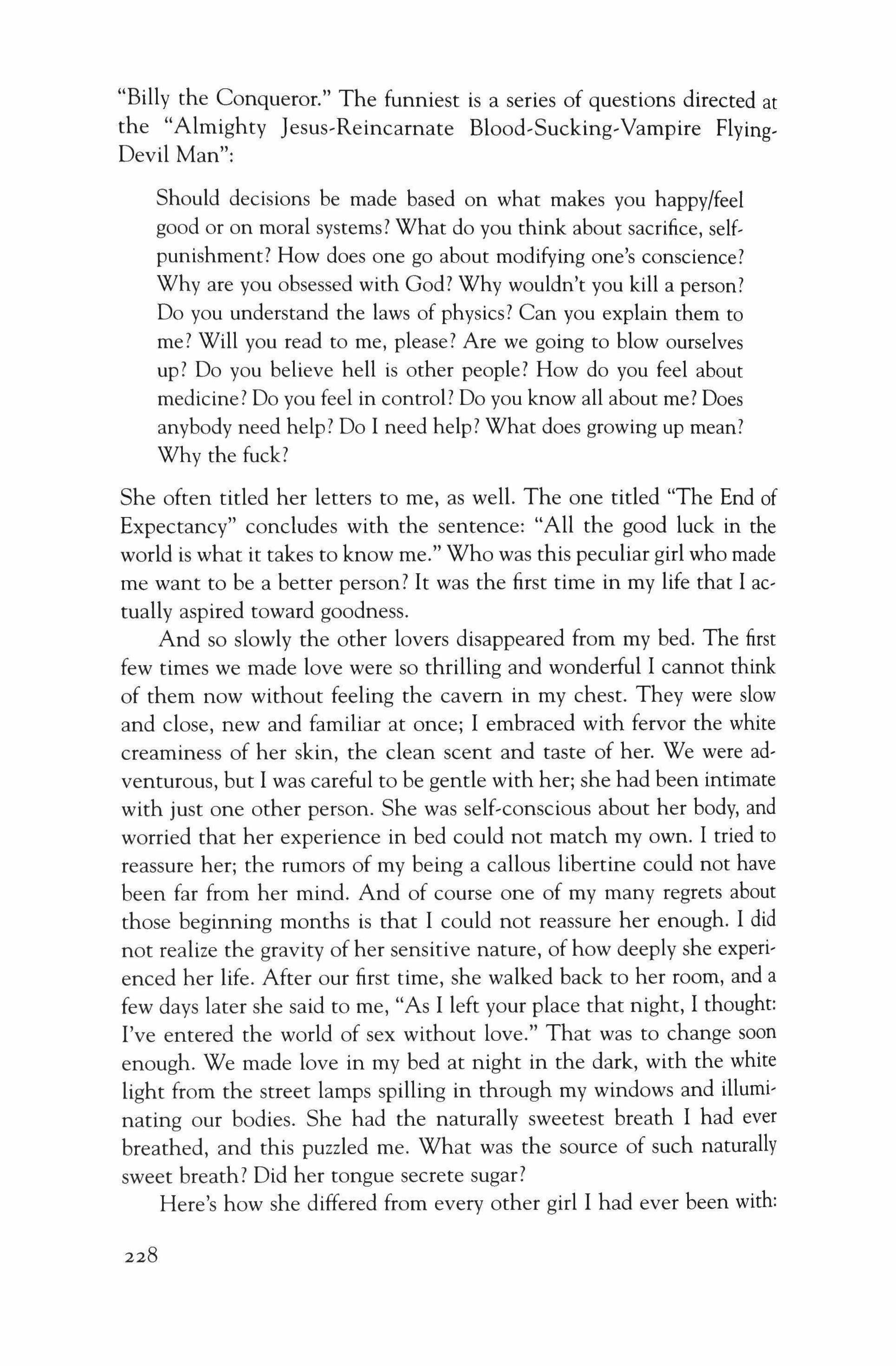
"Billy the Conqueror." The funniest is a series of questions directed at the "Almighty Jesus-Reincarnate Blood-Sucking-Vampire FlyingDevil Man":
Should decisions be made based on what makes you happy/feel good or on moral systems? What do you think about sacrifice, selfpunishment? How does one go about modifying one's conscience? Why are you obsessed with God? Why wouldn't you kill a person? Do you understand the laws of physics? Can you explain them to me? Will you read to me, please? Are we going to blow ourselves up? Do you believe hell is other people? How do you feel about medicine? Do you feel in control? Do you know all about me? Does anybody need help? Do I need help? What does growing up mean? Why the fuck?
She often titled her letters to me, as well. The one titled "The End of Expectancy" concludes with the sentence: "All the good luck in the world is what it takes to know me." Who was this peculiar girl who made me want to be a better person? It was the first time in my life that I actually aspired toward goodness. And so slowly the other lovers disappeared from my bed. The first few times we made love were so thrilling and wonderful I cannot think of them now without feeling the cavern in my chest. They were slow and close, new and familiar at once; I embraced with fervor the white creaminess of her skin, the clean scent and taste of her. We were adventurous, but I was careful to be gentle with her; she had been intimate with just one other person. She was self-conscious about her body, and worried that her experience in bed could not match my own. I tried to reassure her; the rumors of my being a callous libertine could not have been far from her mind. And of course one of my many regrets about those beginning months is that I could not reassure her enough. I did not realize the gravity of her sensitive nature, of how deeply she experienced her life. After our first time, she walked back to her room, and a few days later she said to me, "As I left your place that night, I thought: I've entered the world of sex without love." That was to change soon enough. We made love in my bed at night in the dark, with the white light from the street lamps spilling in through my windows and illuminating our bodies. She had the naturally sweetest breath I had ever breathed, and this puzzled me. What was the source of such naturally sweet breath? Did her tongue secrete sugar?
Here's how she differed from every other girl I had ever been with:
228
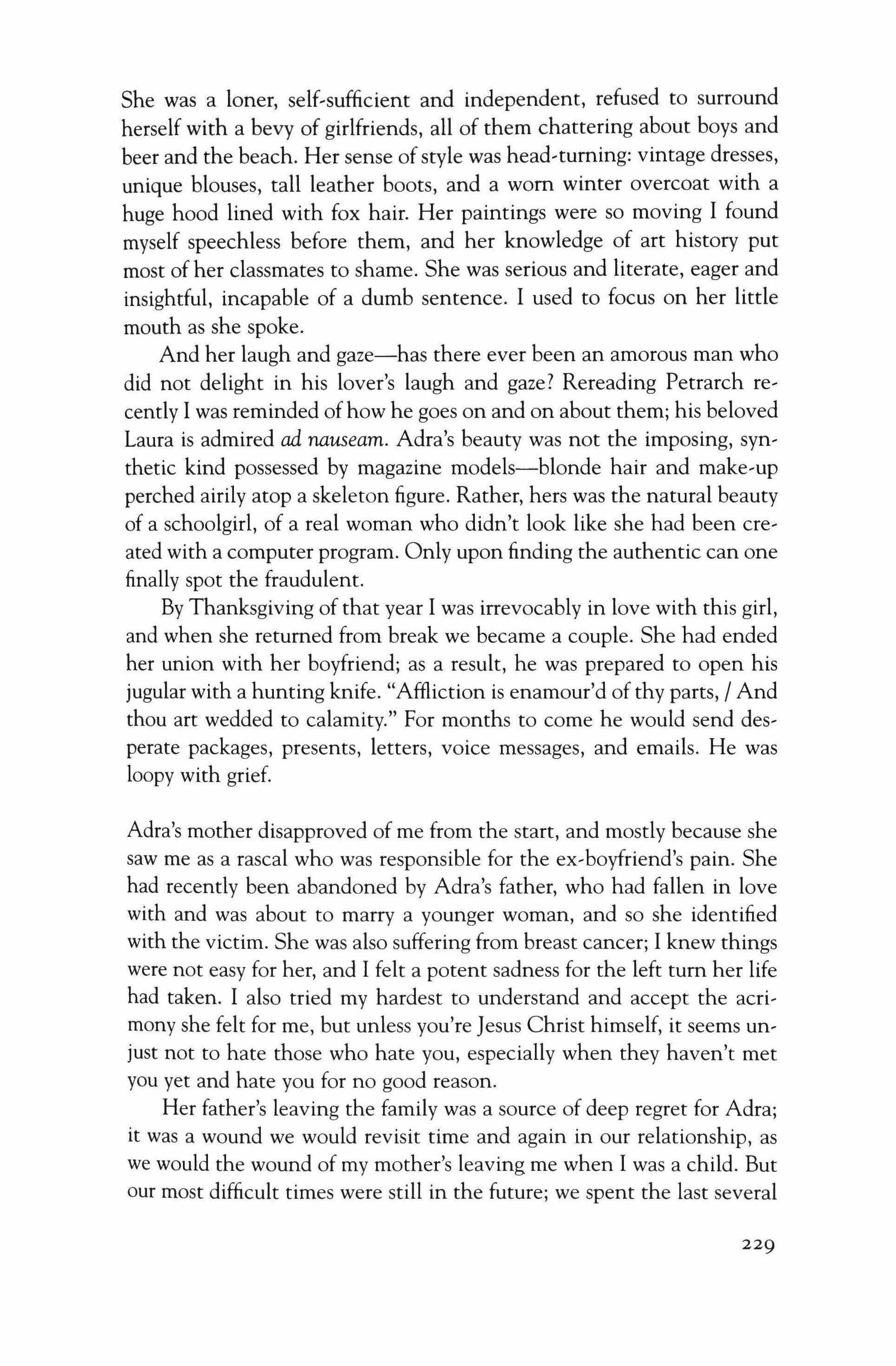
She was a loner, self-sufficient and independent, refused to surround herself with a bevy of girlfriends, all of them chattering about boys and beer and the beach. Her sense ofstyle was head-turning: vintage dresses, unique blouses, tall leather boots, and a worn winter overcoat with a huge hood lined with fox hair. Her paintings were so moving I found myself speechless before them, and her knowledge of art history put most ofher classmates to shame. She was serious and literate, eager and insightful, incapable of a dumb sentence. I used to focus on her little mouth as she spoke.
And her laugh and gaze-has there ever been an amorous man who did not delight in his lover's laugh and gaze? Rereading Petrarch recently I was reminded ofhow he goes on and on about them; his beloved Laura is admired ad nauseam. Adra's beauty was not the imposing, synthetic kind possessed by magazine models-blonde hair and make-up perched airily atop a skeleton figure. Rather, hers was the natural beauty of a schoolgirl, of a real woman who didn't look like she had been created with a computer program. Only upon finding the authentic can one finally spot the fraudulent.
By Thanksgiving of that year I was irrevocably in love with this girl, and when she returned from break we became a couple. She had ended her union with her boyfriend; as a result, he was prepared to open his jugular with a hunting knife. "Affliction is enamour'd of thy parts, / And thou art wedded to calamity." For months to come he would send desperate packages, presents, letters, voice messages, and emails. He was loopy with grief.
Adra's mother disapproved of me from the start, and mostly because she saw me as a rascal who was responsible for the ex-boyfriend's pain. She had recently been abandoned by Adra's father, who had fallen in love with and was about to marry a younger woman, and so she identified with the victim. She was also suffering from breast cancer; I knew things were not easy for her, and I felt a potent sadness for the left tum her life had taken. I also tried my hardest to understand and accept the acrimony she felt for me, but unless you're Jesus Christ himself, it seems unjust not to hate those who hate you, especially when they haven't met you yet and hate you for no good reason.
Her father's leaving the family was a source of deep regret for Adra; it was a wound we would revisit time and again in our relationship, as we would the wound of my mother's leaving me when I was a child. But our most difficult times were still in the future; we spent the last several
229
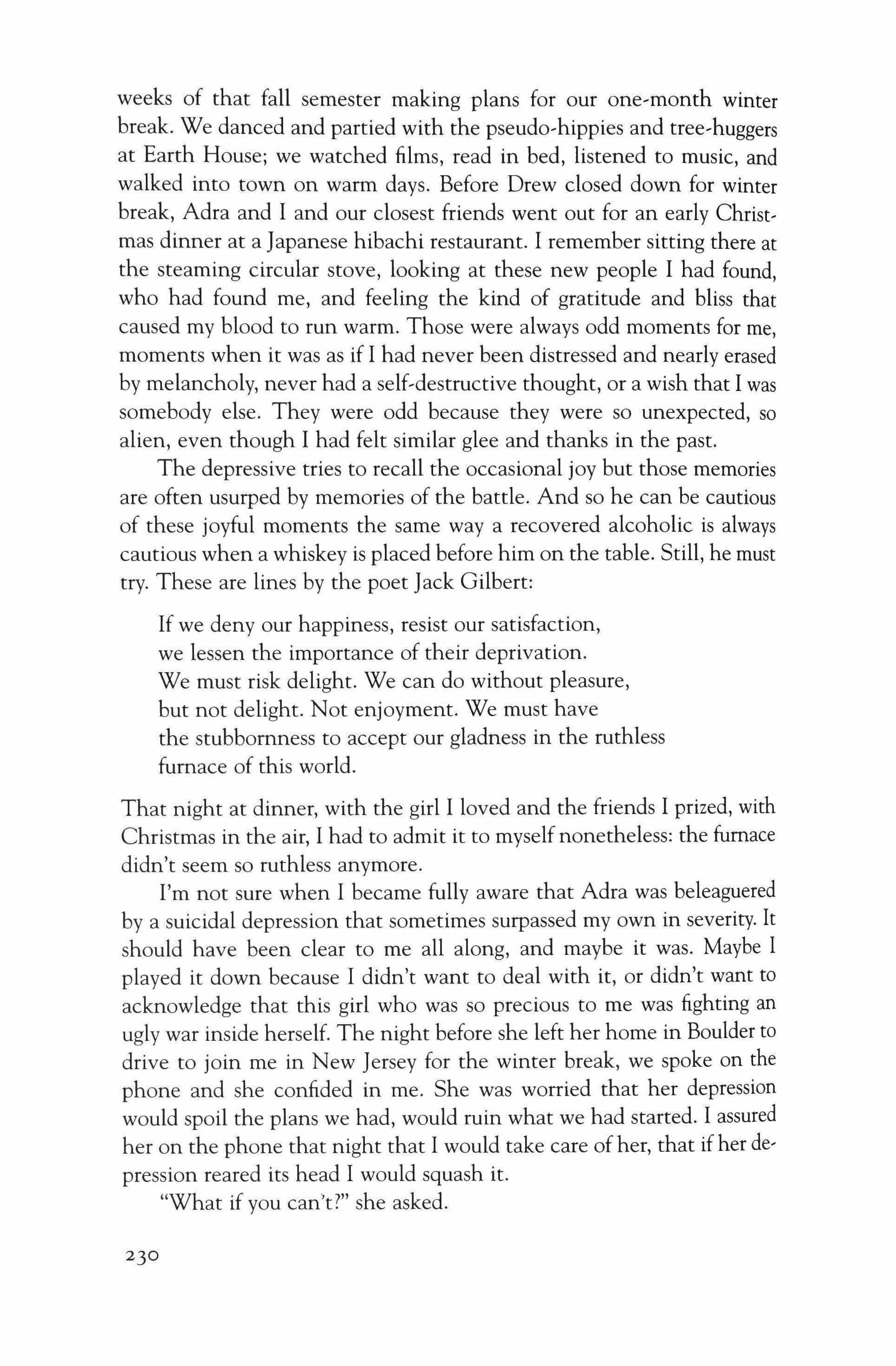
weeks of that fall semester making plans for our one-month winter break. We danced and partied with the pseudo-hippies and tree-huggsn at Earth House; we watched films, read in bed, listened to music, and walked into town on warm days. Before Drew closed down for winter break, Adra and I and our closest friends went out for an early Christmas dinner at a Japanese hibachi restaurant. I remember sitting there at the steaming circular stove, looking at these new people I had found, who had found me, and feeling the kind of gratitude and bliss that caused my blood to run warm. Those were always odd moments for me, moments when it was as if I had never been distressed and nearly erased by melancholy, never had a self-destructive thought, or a wish that I was somebody else. They were odd because they were so unexpected, so alien, even though I had felt similar glee and thanks in the past.
The depressive tries to recall the occasional joy but those memories are often usurped by memories of the battle. And so he can be cautious of these joyful moments the same way a recovered alcoholic is always cautious when a whiskey is placed before him on the table. Still, he must try. These are lines by the poet Jack Gilbert:
If we deny our happiness, resist our satisfaction, we lessen the importance of their deprivation. We must risk delight. We can do without pleasure, but not delight. Not enjoyment. We must have the stubbornness to accept our gladness in the ruthless furnace of this world.
That night at dinner, with the girl I loved and the friends I prized, with Christmas in the air, I had to admit it to myself nonetheless: the furnace didn't seem so ruthless anymore.
I'm not sure when I became fully aware that Adra was beleaguered by a suicidal depression that sometimes surpassed my own in severity. It should have been clear to me all along, and maybe it was. Maybe I played it down because I didn't want to deal with it, or didn't want to acknowledge that this girl who was so precious to me was fighting an ugly war inside herself. The night before she left her home in Boulder to drive to join me in New Jersey for the winter break, we spoke on the phone and she confided in me. She was worried that her depression would spoil the plans we had, would ruin what we had started. I assured her on the phone that night that I would take care ofher, that if her depression reared its head I would squash it.
"What if you can't?" she asked.
230
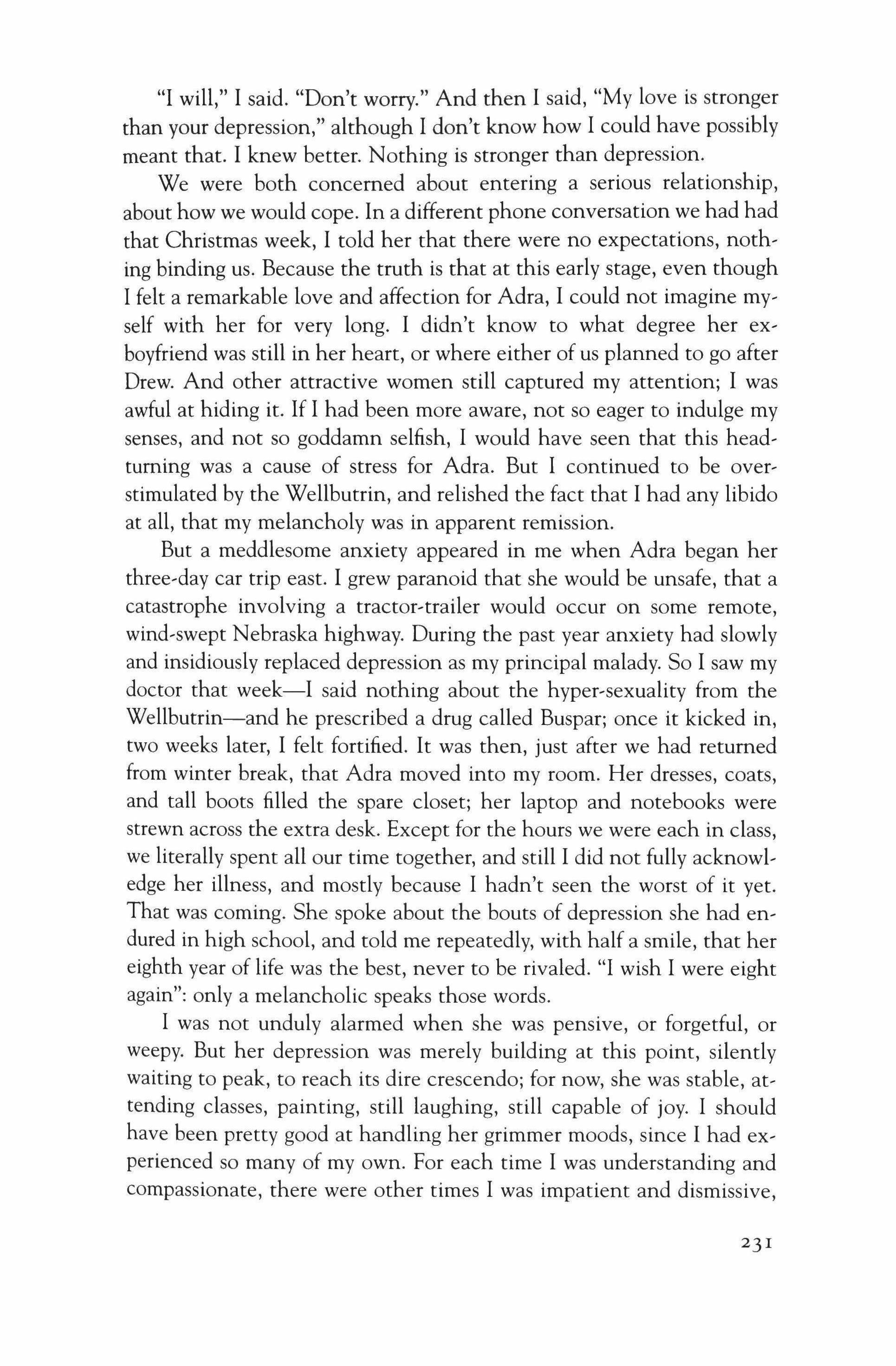
"I will," I said. "Don't worry." And then I said, "My love is stronger than your depression," although I don't know how I could have possibly meant that. I knew better. Nothing is stronger than depression.
We were both concerned about entering a serious relationship, about how we would cope. In a different phone conversation we had had that Christmas week, I told her that there were no expectations, nothing binding us. Because the truth is that at this early stage, even though I felt a remarkable love and affection for Adra, I could not imagine my' self with her for very long. I didn't know to what degree her ex, boyfriend was still in her heart, or where either of us planned to go after Drew. And other attractive women still captured my attention; I was awful at hiding it. If I had been more aware, not so eager to indulge my senses, and not so goddamn selfish, I would have seen that this head, turning was a cause of stress for Adra. But I continued to be over, stimulated by the Wellbutrin, and relished the fact that I had any libido at all, that my melancholy was in apparent remission.
But a meddlesome anxiety appeared in me when Adra began her three,day car trip east. I grew paranoid that she would be unsafe, that a catastrophe involving a tractor,trailer would occur on some remote, wind-swept Nebraska highway. During the past year anxiety had slowly and insidiously replaced depression as my principal malady. So I saw my doctor that week-I said nothing about the hyper'sexuality from the Wellbutrin-and he prescribed a drug called Buspar; once it kicked in, two weeks later, I felt fortified. It was then, just after we had returned from winter break, that Adra moved into my room. Her dresses, coats, and tall boots filled the spare closet; her laptop and notebooks were strewn across the extra desk. Except for the hours we were each in class, we literally spent all our time together, and still 1 did not fully acknowledge her illness, and mostly because 1 hadn't seen the worst of it yet. That was coming. She spoke about the bouts of depression she had en, dured in high school, and told me repeatedly, with half a smile, that her eighth year of life was the best, never to be rivaled. "I wish 1 were eight again": only a melancholic speaks those words.
1 was not unduly alarmed when she was pensive, or forgetful, or weepy. But her depression was merely building at this point, silently waiting to peak, to reach its dire crescendo; for now, she was stable, at, tending classes, painting, still laughing, still capable of joy. 1 should have been pretty good at handling her grimmer moods, since 1 had ex, perienced so many of my own. For each time 1 was understanding and compassionate, there were other times 1 was impatient and dismissive,
231
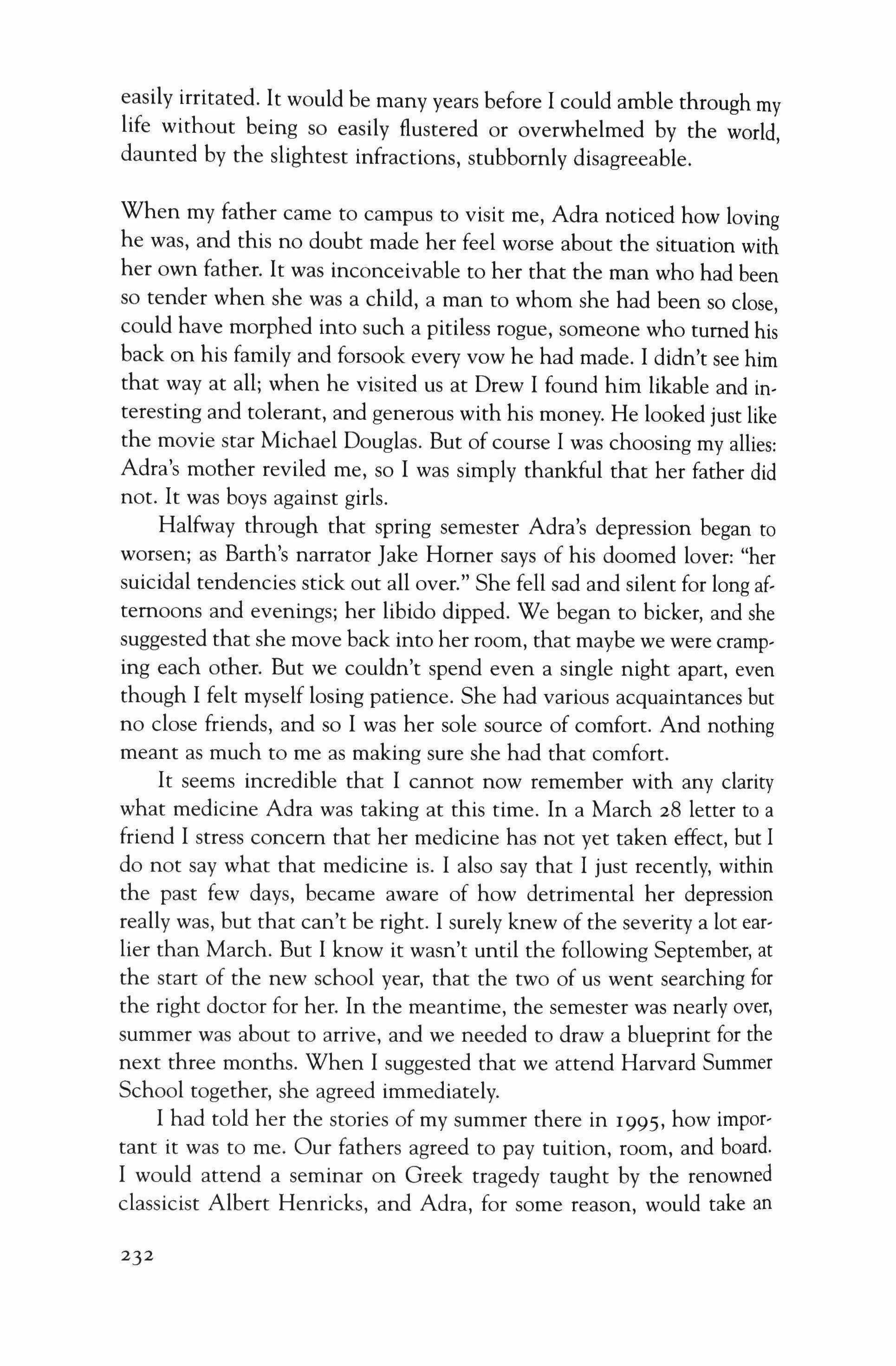
easily irritated. It would be many years before I could amble through my life without being so easily flustered or overwhelmed by the world, daunted by the slightest infractions, stubbornly disagreeable.
When my father came to campus to visit me, Adra noticed how loving he was, and this no doubt made her feel worse about the situation with her own father. It was inconceivable to her that the man who had been so tender when she was a child, a man to whom she had been so close, could have morphed into such a pitiless rogue, someone who turned his back on his family and forsook every vow he had made. I didn't see him that way at all; when he visited us at Drew I found him likable and interesting and tolerant, and generous with his money. He looked just like the movie star Michael Douglas. But of course I was choosing my allies: Adra's mother reviled me, so I was simply thankful that her father did not. It was boys against girls.
Halfway through that spring semester Adra's depression began to worsen; as Barth's narrator Jake Horner says of his doomed lover: "her suicidal tendencies stick out all over." She fell sad and silent for long afternoons and evenings; her libido dipped. We began to bicker, and she suggested that she move back into her room, that maybe we were cramping each other. But we couldn't spend even a single night apart, even though I felt myself losing patience. She had various acquaintances but no close friends, and so I was her sole source of comfort. And nothing meant as much to me as making sure she had that comfort.
It seems incredible that I cannot now remember with any clarity what medicine Adra was taking at this time. In a March 28 letter to a friend I stress concern that her medicine has not yet taken effect, but I do not say what that medicine is. I also say that I just recently, within the past few days, became aware of how detrimental her depression really was, but that can't be right. I surely knew of the severity a lot earlier than March. But I know it wasn't until the following September, at the start of the new school year, that the two of us went searching for the right doctor for her. In the meantime, the semester was nearly over, summer was about to arrive, and we needed to draw a blueprint for the next three months. When I suggested that we attend Harvard Summer School together, she agreed immediately.
I had told her the stories of my summer there in I995, how important it was to me. Our fathers agreed to pay tuition, room, and board. I would attend a seminar on Greek tragedy taught by the renowned classicist Albert Henricks, and Adra, for some reason, would take an
232
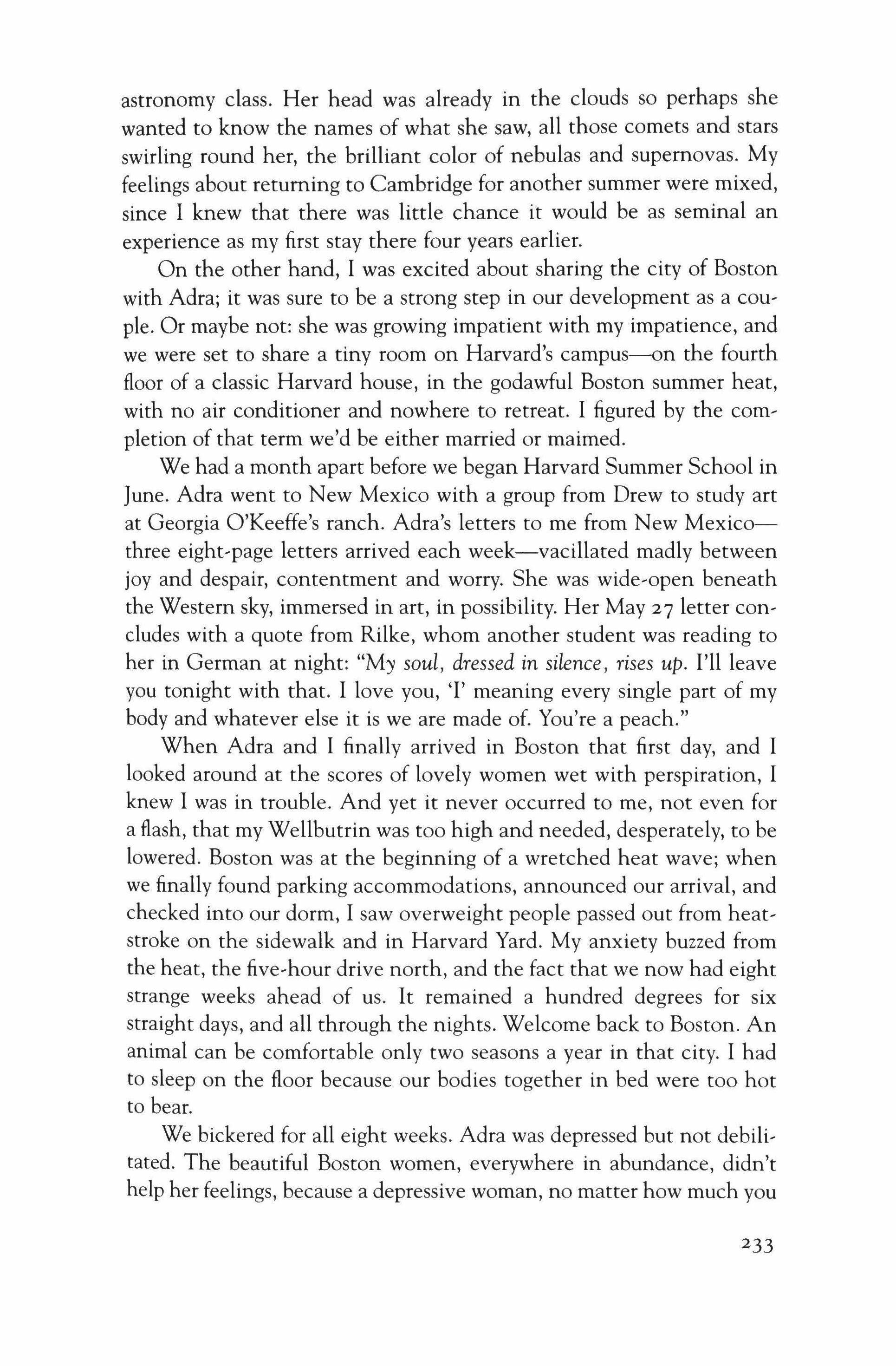
astronomy class. Her head was already in the clouds so perhaps she wanted to know the names of what she saw, all those comets and stars swirling round her, the brilliant color of nebulas and supernovas. My feelings about returning to Cambridge for another summer were mixed, since I knew that there was little chance it would be as seminal an experience as my first stay there four years earlier.
On the other hand, I was excited about sharing the city of Boston with Adra: it was sure to be a strong step in our development as a couple. Or maybe not: she was growing impatient with my impatience, and we were set to share a tiny room on Harvard's campus-on the fourth floor of a classic Harvard house, in the godawful Boston summer heat, with no air conditioner and nowhere to retreat. I figured by the completion of that term we'd be either married or maimed.
We had a month apart before we began Harvard Summer School in June. Adra went to New Mexico with a group from Drew to study art at Georgia O'Keeffe's ranch. Adra's letters to me from New Mexicothree eight-page letters arrived each week-vacillated madly between joy and despair, contentment and worry. She was wide-open beneath the Western sky, immersed in art, in possibility. Her May 27 letter concludes with a quote from Rilke, whom another student was reading to her in German at night: "My soul, dressed in silence, rises up. I'll leave you tonight with that. I love you, 'I' meaning every single part of my body and whatever else it is we are made of. You're a peach."
When Adra and I finally arrived in Boston that first day, and I looked around at the scores of lovely women wet with perspiration, I knew I was in trouble. And yet it never occurred to me, not even for a flash, that my Wellbutrin was too high and needed, desperately, to be lowered. Boston was at the beginning of a wretched heat wave; when we finally found parking accommodations, announced our arrival, and checked into our dorm, I saw overweight people passed out from heatstroke on the sidewalk and in Harvard Yard. My anxiety buzzed from the heat, the five-hour drive north, and the fact that we now had eight strange weeks ahead of us. It remained a hundred degrees for six straight days, and all through the nights. Welcome back to Boston. An animal can be comfortable only two seasons a year in that city. I had to sleep on the floor because our bodies together in bed were too hot to bear.
We bickered for all eight weeks. Adra was depressed but not debilitated. The beautiful Boston women, everywhere in abundance, didn't help her feelings, because a depressive woman, no matter how much you
233
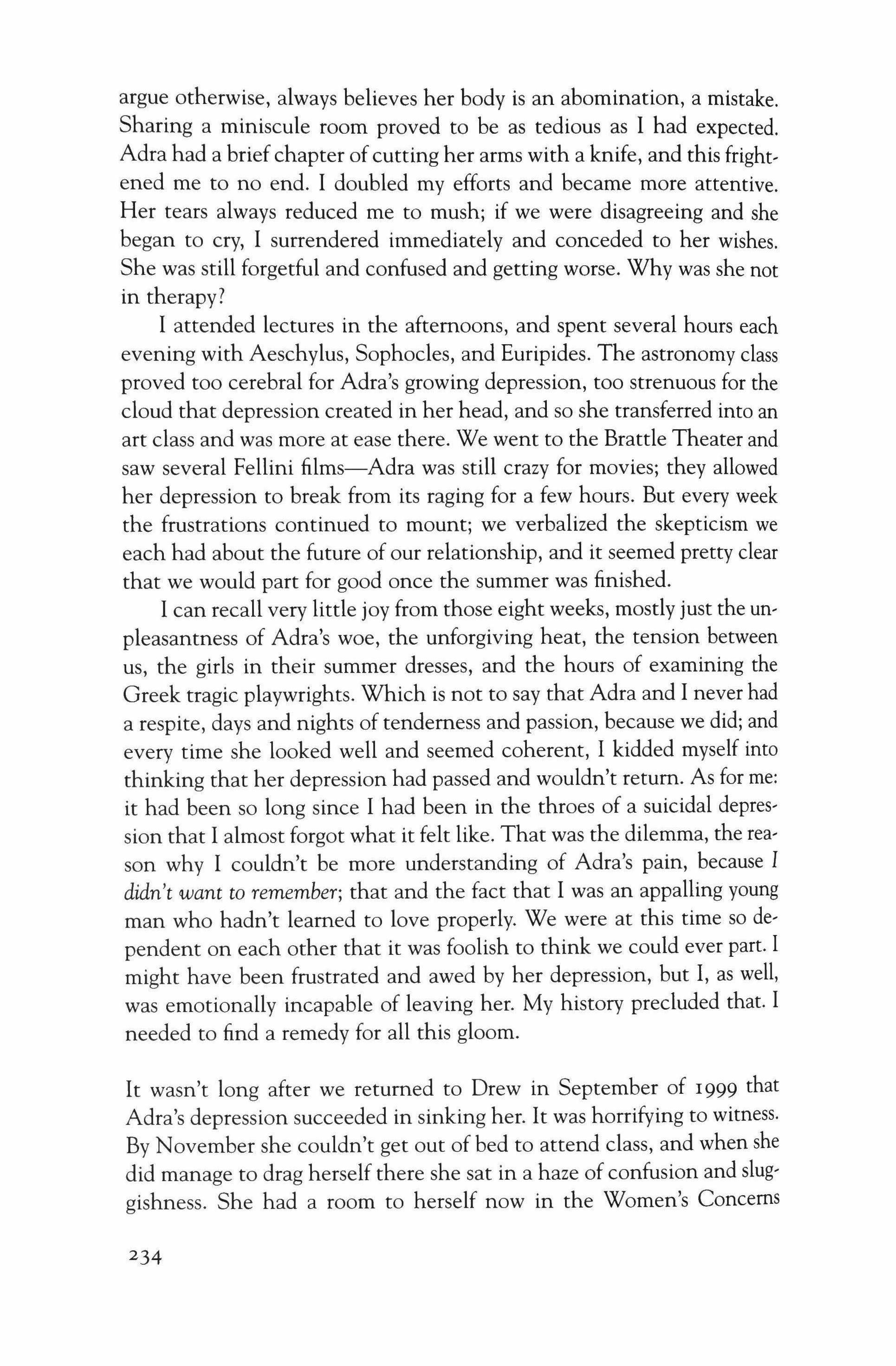
argue otherwise, always believes her body is an abomination, a mistake. Sharing a miniscule room proved to be as tedious as I had expected. Adra had a brief chapter ofcutting her arms with a knife, and this frightened me to no end. I doubled my efforts and became more attentive. Her tears always reduced me to mush; if we were disagreeing and she began to cry, I surrendered immediately and conceded to her wishes. She was still forgetful and confused and getting worse. Why was she not in therapy?
I attended lectures in the afternoons, and spent several hours each evening with Aeschylus, Sophocles, and Euripides. The astronomy class proved too cerebral for Adra's growing depression, too strenuous for the cloud that depression created in her head, and so she transferred into an art class and was more at ease there. We went to the Brattle Theater and saw several Fellini films-Adra was still crazy for movies; they allowed her depression to break from its raging for a few hours. But every week the frustrations continued to mount; we verbalized the skepticism we each had about the future of our relationship, and it seemed pretty clear that we would part for good once the summer was finished.
I can recall very little joy from those eight weeks, mostly just the unpleasantness of Adra's woe, the unforgiving heat, the tension between us, the girls in their summer dresses, and the hours of examining the Greek tragic playwrights. Which is not to say that Adra and I never had a respite, days and nights of tenderness and passion, because we did; and every time she looked well and seemed coherent, I kidded myself into thinking that her depression had passed and wouldn't return. As for me: it had been so long since I had been in the throes of a suicidal depression that I almost forgot what it felt like. That was the dilemma, the reason why I couldn't be more understanding of Adra's pain, because I didn't want to remember; that and the fact that I was an appalling young man who hadn't learned to love properly. We were at this time so dependent on each other that it was foolish to think we could ever part. I might have been frustrated and awed by her depression, but I, as well, was emotionally incapable of leaving her. My history precluded that. I needed to find a remedy for all this gloom.
It wasn't long after we returned to Drew in September of 1999 that Adra's depression succeeded in sinking her. It was horrifying to witness. By November she couldn't get out of bed to attend class, and when she did manage to drag herself there she sat in a haze of confusion and sluggishness. She had a room to herself now in the Women's Concerns
234
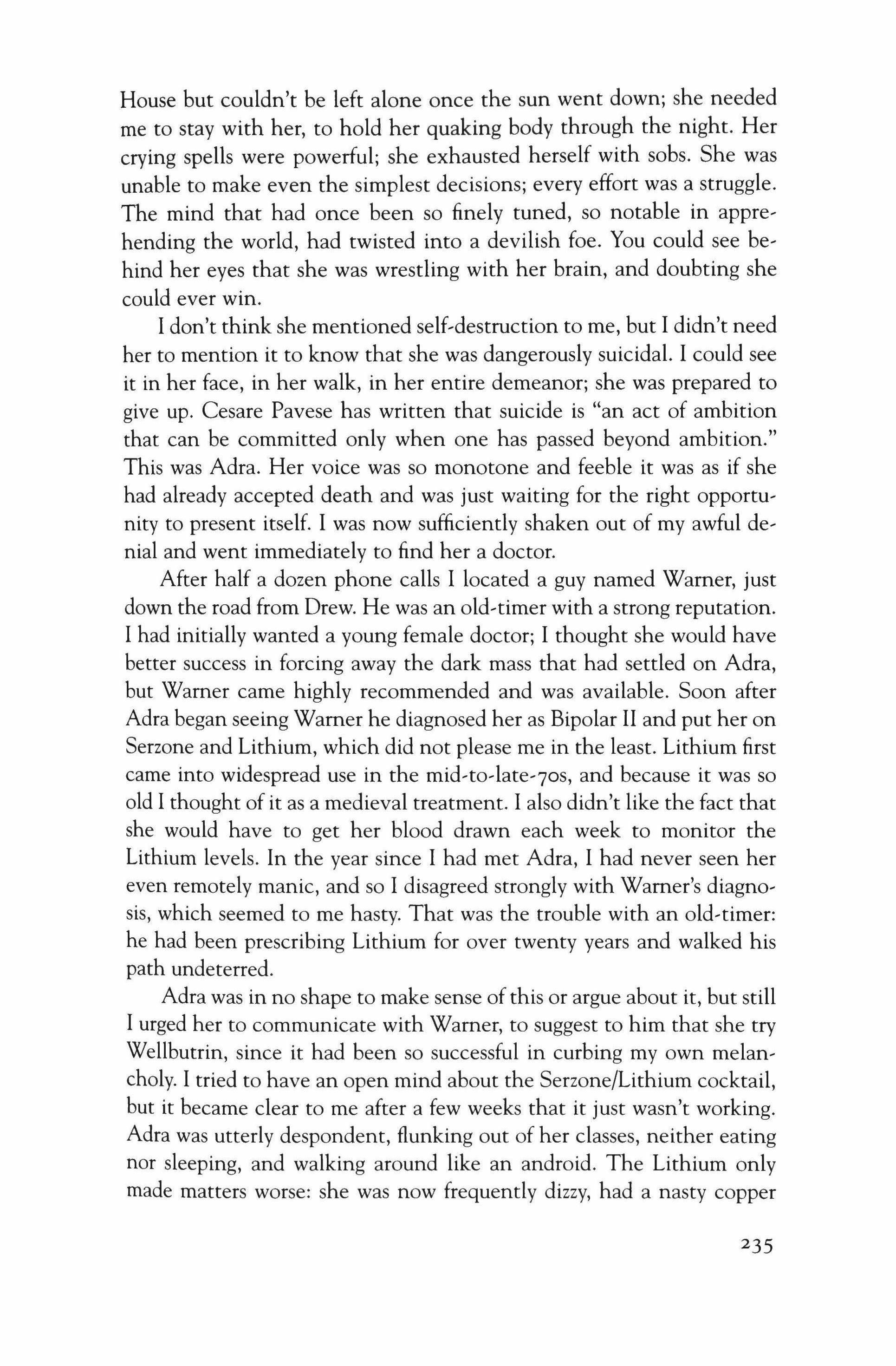
House but couldn't be left alone once the sun went down; she needed me to stay with her, to hold her quaking body through the night. Her crying spells were powerful; she exhausted herself with sobs. She was unable to make even the simplest decisions; every effort was a struggle. The mind that had once been so finely tuned, so notable in apprehending the world, had twisted into a devilish foe. You could see be' hind her eyes that she was wrestling with her brain, and doubting she could ever win.
I don't think she mentioned self-destruction to me, but I didn't need her to mention it to know that she was dangerously suicidal. I could see it in her face, in her walk, in her entire demeanor; she was prepared to give up. Cesare Pavese has written that suicide is "an act of ambition that can be committed only when one has passed beyond ambition." This was Adra. Her voice was so monotone and feeble it was as if she had already accepted death and was just waiting for the right opportunity to present itself. I was now sufficiently shaken out of my awful de, nial and went immediately to find her a doctor.
After half a dozen phone calls I located a guy named Warner, just down the road from Drew. He was an old,timer with a strong reputation. I had initially wanted a young female doctor; I thought she would have better success in forcing away the dark mass that had settled on Adra, but Warner came highly recommended and was available. Soon after Adra began seeing Warner he diagnosed her as Bipolar II and put her on Serzone and Lithium, which did not please me in the least. Lithium first came into widespread use in the mid-to-late-cos, and because it was so old I thought of it as a medieval treatment. I also didn't like the fact that she would have to get her blood drawn each week to monitor the Lithium levels. In the year since I had met Adra, I had never seen her even remotely manic, and so I disagreed strongly with Warner's diagnosis, which seemed to me hasty. That was the trouble with an old,timer: he had been prescribing Lithium for over twenty years and walked his path undeterred.
Adra was in no shape to make sense ofthis or argue about it, but still I urged her to communicate with Warner, to suggest to him that she try Wellbutrin, since it had been so successful in curbing my own rnelancholy. I tried to have an open mind about the Serzone/Lithium cocktail, but it became clear to me after a few weeks that it just wasn't working. Adra was utterly despondent, flunking out of her classes, neither eating nor sleeping, and walking around like an android. The Lithium only made matters worse: she was now frequently dizzy, had a nasty copper
235
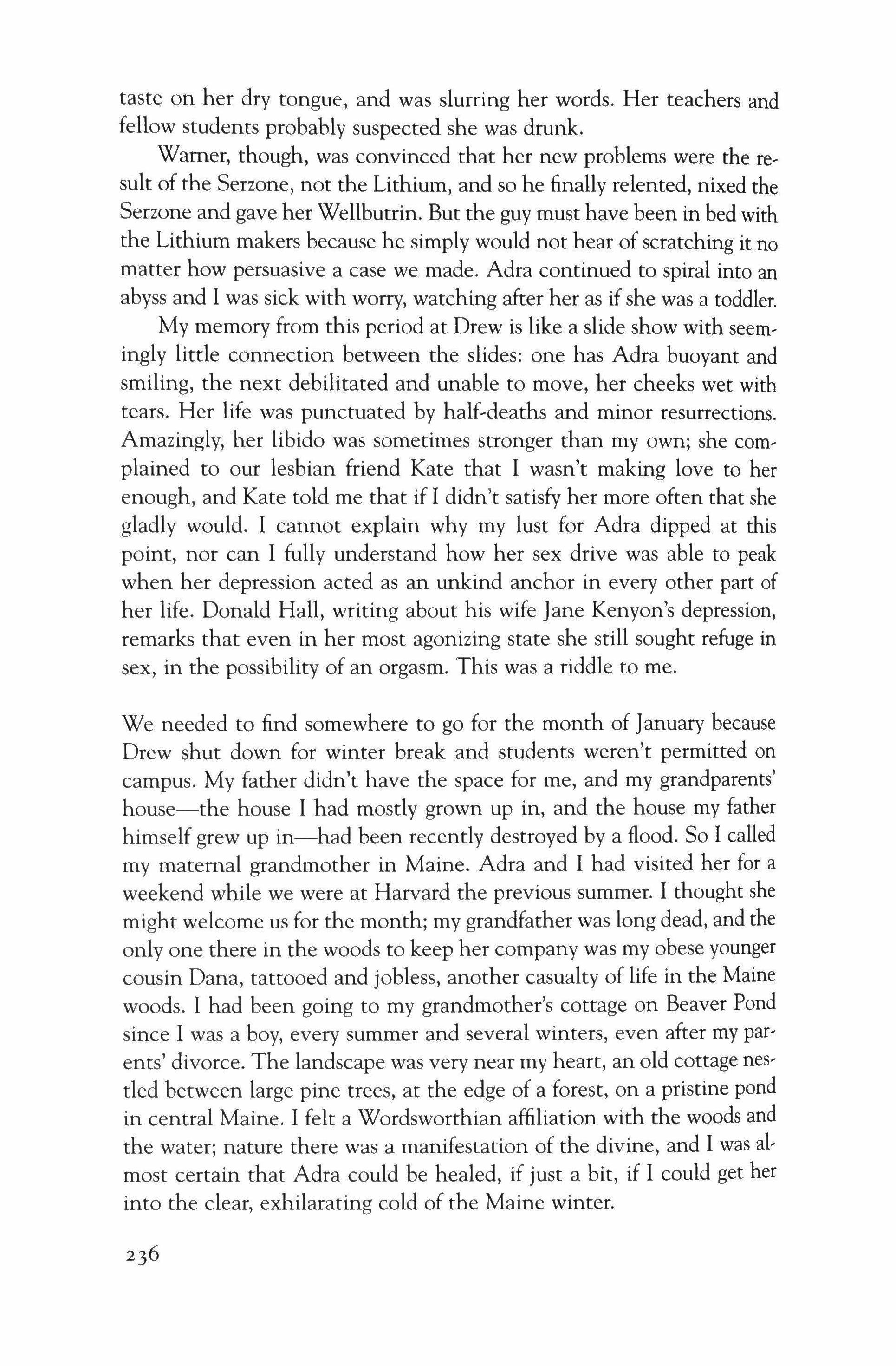
taste on her dry tongue, and was slurring her words. Her teachers and fellow students probably suspected she was drunk.
Warner, though, was convinced that her new problems were the result of the Serzone, not the Lithium, and so he finally relented, nixed the Serzone and gave her Wellbutrin. But the guy must have been in bed with the Lithium makers because he simply would not hear of scratching it no matter how persuasive a case we made. Adra continued to spiral into an abyss and I was sick with worry, watching after her as if she was a toddler.
My memory from this period at Drew is like a slide show with seemingly little connection between the slides: one has Adra buoyant and smiling, the next debilitated and unable to move, her cheeks wet with tears. Her life was punctuated by half-deaths and minor resurrections. Amazingly, her libido was sometimes stronger than my own; she complained to our lesbian friend Kate that I wasn't making love to her enough, and Kate told me that if I didn't satisfy her more often that she gladly would. I cannot explain why my lust for Adra dipped at this point, nor can I fully understand how her sex drive was able to peak when her depression acted as an unkind anchor in every other part of her life. Donald Hall, writing about his wife Jane Kenyon's depression, remarks that even in her most agonizing state she still sought refuge in sex, in the possibility of an orgasm. This was a riddle to me.
We needed to find somewhere to go for the month of January because Drew shut down for winter break and students weren't permitted on campus. My father didn't have the space for me, and my grandparents' house-the house I had mostly grown up in, and the house my father himself grew up in-had been recently destroyed by a flood. So I called my maternal grandmother in Maine. Adra and I had visited her for a weekend while we were at Harvard the previous summer. I thought she might welcome us for the month; my grandfather was long dead, and the only one there in the woods to keep her company was my obese younger cousin Dana, tattooed and jobless, another casualty of life in the Maine woods. I had been going to my grandmother's cottage on Beaver Pond since I was a boy, every summer and several winters, even after my parents' divorce. The landscape was very near my heart, an old cottage nestled between large pine trees, at the edge of a forest, on a pristine pond in central Maine. I felt a Wordsworthian affiliation with the woods and the water; nature there was a manifestation of the divine, and I was almost certain that Adra could be healed, if just a bit, if I could get her into the clear, exhilarating cold of the Maine winter.
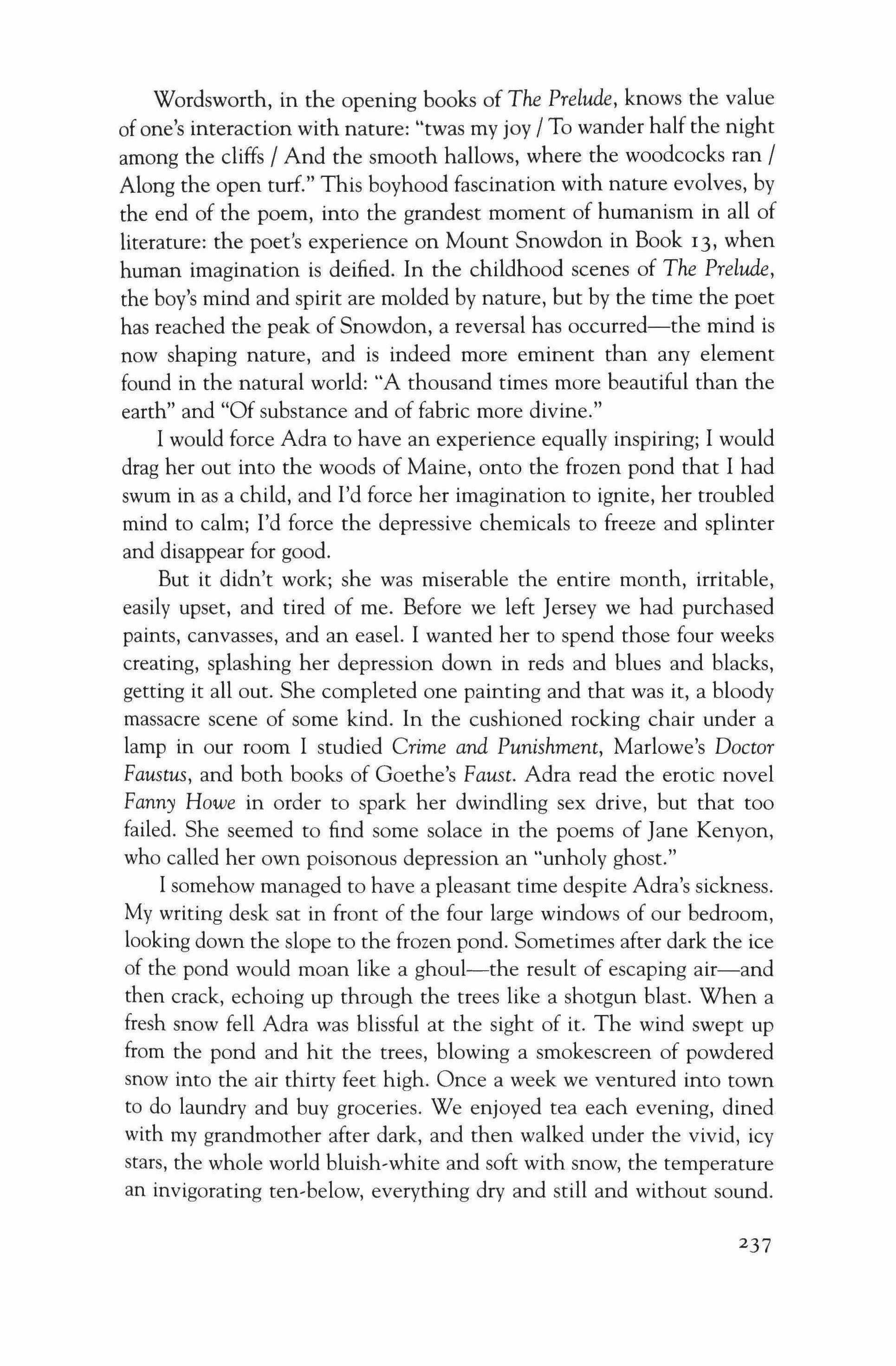
Wordsworth, in the opening books of The Prelude, knows the value of one's interaction with nature: "twas my joy / To wander half the night among the cliffs / And the smooth hallows, where the woodcocks ran / Along the open turf." This boyhood fascination with nature evolves, by the end of the poem, into the grandest moment of humanism in all of literature: the poet's experience on Mount Snowdon in Book 13, when human imagination is deified. In the childhood scenes of The Prelude, the boy's mind and spirit are molded by nature, but by the time the poet has reached the peak of Snowdon, a reversal has occurred-the mind is now shaping nature, and is indeed more eminent than any element found in the natural world: "A thousand times more beautiful than the earth" and "Of substance and of fabric more divine."
I would force Adra to have an experience equally inspiring; I would drag her out into the woods of Maine, onto the frozen pond that I had swum in as a child, and I'd force her imagination to ignite, her troubled mind to calm; I'd force the depressive chemicals to freeze and splinter and disappear for good.
But it didn't work; she was miserable the entire month, irritable, easily upset, and tired of me. Before we left Jersey we had purchased paints, canvasses, and an easel. I wanted her to spend those four weeks creating, splashing her depression down in reds and blues and blacks, getting it all out. She completed one painting and that was it, a bloody massacre scene of some kind. In the cushioned rocking chair under a lamp in our room I studied Crime and Punishment, Marlowe's Doctor Faustus, and both books of Goethe's Faust. Adra read the erotic novel Fanny Howe in order to spark her dwindling sex drive, but that too failed. She seemed to find some solace in the poems of Jane Kenyon, who called her own poisonous depression an "unholy ghost."
I somehow managed to have a pleasant time despite Adra's sickness. My writing desk sat in front of the four large windows of our bedroom, looking down the slope to the frozen pond. Sometimes after dark the ice of the pond would moan like a ghoul-the result of escaping air-and then crack, echoing up through the trees like a shotgun blast. When a fresh snow fell Adra was blissful at the sight of it. The wind swept up from the pond and hit the trees, blowing a smokescreen of powdered snow into the air thirty feet high. Once a week we ventured into town to do laundry and buy groceries. We enjoyed tea each evening, dined with my grandmother after dark, and then walked under the vivid, icy stars, the whole world bluish-white and soft with snow, the temperature an invigorating ten-below, everything dry and still and without sound.
237
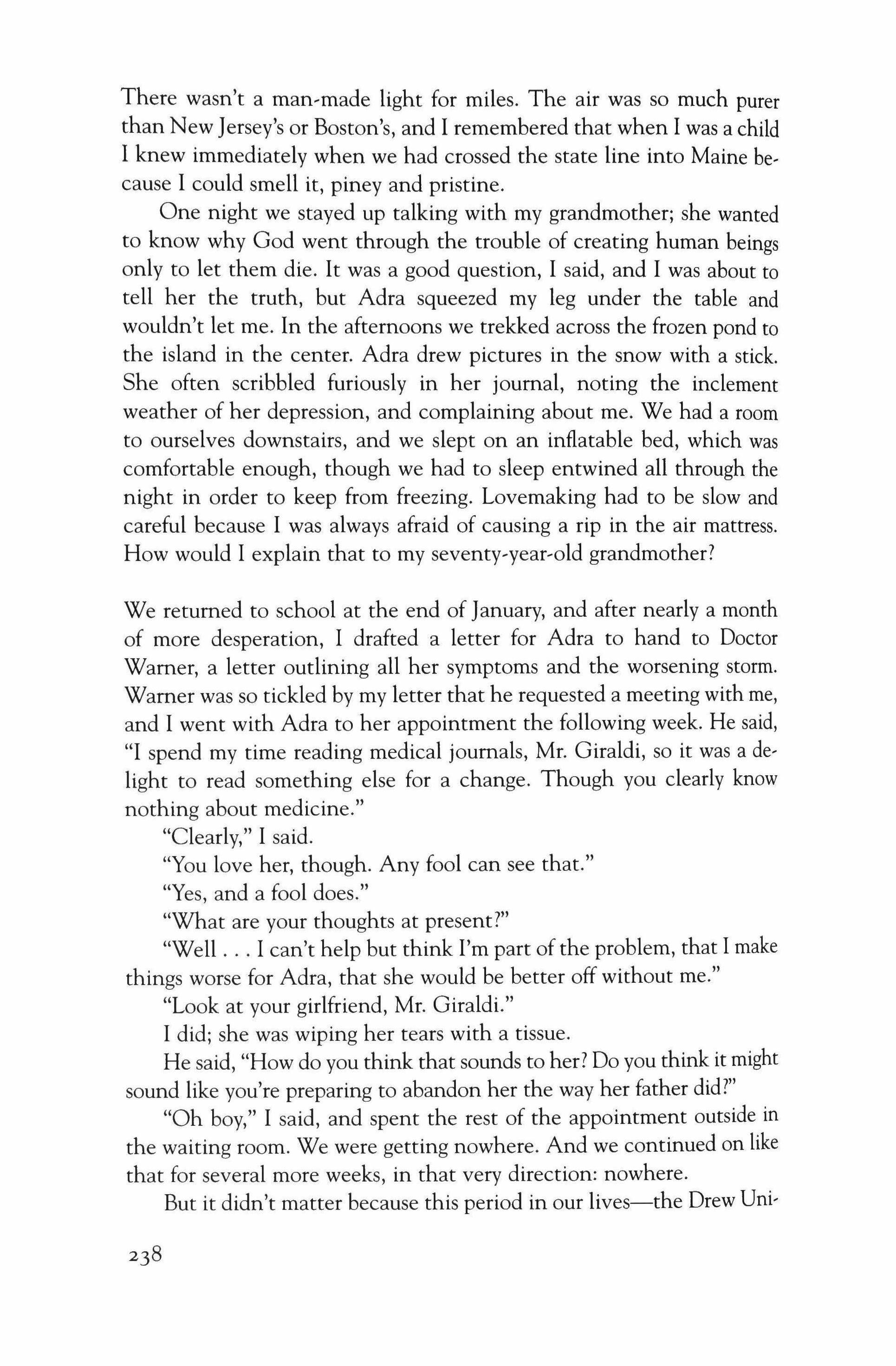
There wasn't a man-made light for miles. The air was so much purer than New Jersey's or Boston's, and I remembered that when I was a child I knew immediately when we had crossed the state line into Maine because I could smell it, piney and pristine.
One night we stayed up talking with my grandmother; she wanted to know why God went through the trouble of creating human beings only to let them die. It was a good question, I said, and I was about to tell her the truth, but Adra squeezed my leg under the table and wouldn't let me. In the afternoons we trekked across the frozen pond to the island in the center. Adra drew pictures in the snow with a stick. She often scribbled furiously in her journal, noting the inclement weather of her depression, and complaining about me. We had a room to ourselves downstairs, and we slept on an inflatable bed, which was comfortable enough, though we had to sleep entwined all through the night in order to keep from freezing. Lovemaking had to be slow and careful because I was always afraid of causing a rip in the air mattress. How would I explain that to my seventy-year-old grandmother?
We returned to school at the end of January, and after nearly a month of more desperation, I drafted a letter for Adra to hand to Doctor Warner, a letter outlining all her symptoms and the worsening storm. Warner was so tickled by my letter that he requested a meeting with me, and I went with Adra to her appointment the following week. He said, "I spend my time reading medical journals, Mr. Giraldi, so it was a delight to read something else for a change. Though you clearly know nothing about medicine."
"Clearly," I said.
"You love her, though. Any fool can see that."
"Yes, and a fool does."
"What are your thoughts at present?"
"Well I can't help but think I'm part of the problem, that I make things worse for Adra, that she would be better off without me."
"Look at your girlfriend, Mr. Giraldi."
I did; she was wiping her tears with a tissue.
He said, "How do you think that sounds to her? Do you think it might sound like you're preparing to abandon her the way her father did?"
"Oh boy," I said, and spent the rest of the appointment outside in the waiting room. We were getting nowhere. And we continued on like that for several more weeks, in that very direction: nowhere.
But it didn't matter because this period in our lives-the Drew Uni-
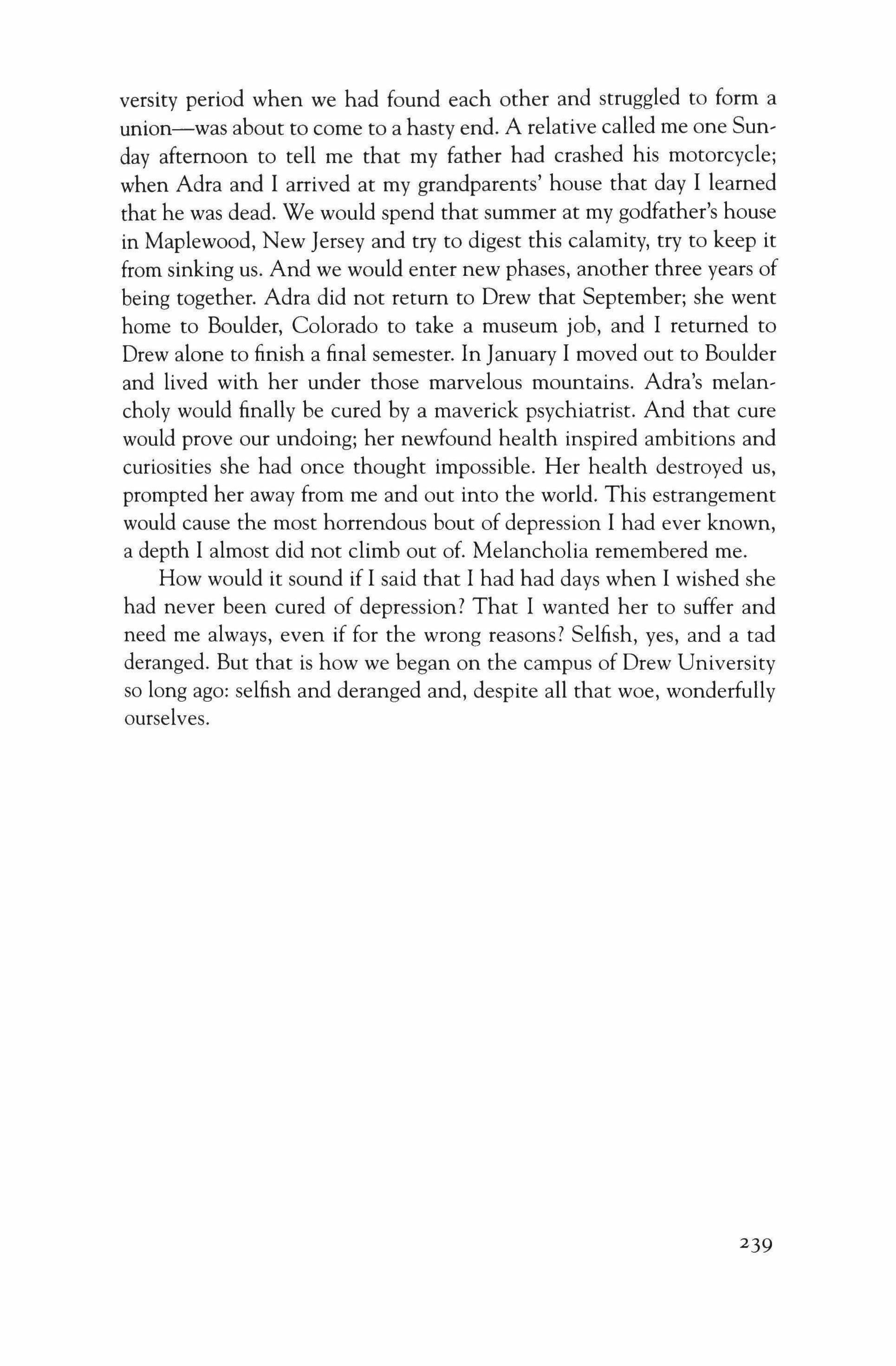
versity period when we had found each other and struggled to form a union-was about to come to a hasty end. A relative called me one Sun, day afternoon to tell me that my father had crashed his motorcycle; when Adra and I arrived at my grandparents' house that day I learned that he was dead. We would spend that summer at my godfather's house in Maplewood, New Jersey and try to digest this calamity, try to keep it from sinking us. And we would enter new phases, another three years of being together. Adra did not return to Drew that September; she went home to Boulder, Colorado to take a museum job, and I returned to Drew alone to finish a final semester. In January I moved out to Boulder and lived with her under those marvelous mountains. Adra's melancholy would finally be cured by a maverick psychiatrist. And that cure would prove our undoing; her newfound health inspired ambitions and curiosities she had once thought impossible. Her health destroyed us, prompted her away from me and out into the world. This estrangement would cause the most horrendous bout of depression I had ever known, a depth I almost did not climb out of. Melancholia remembered me.
How would it sound if I said that I had had days when I wished she had never been cured of depression? That I wanted her to suffer and need me always, even if for the wrong reasons? Selfish, yes, and a tad deranged. But that is how we began on the campus of Drew University so long ago: selfish and deranged and, despite all that woe, wonderfully ourselves.
239
Denis Hirson
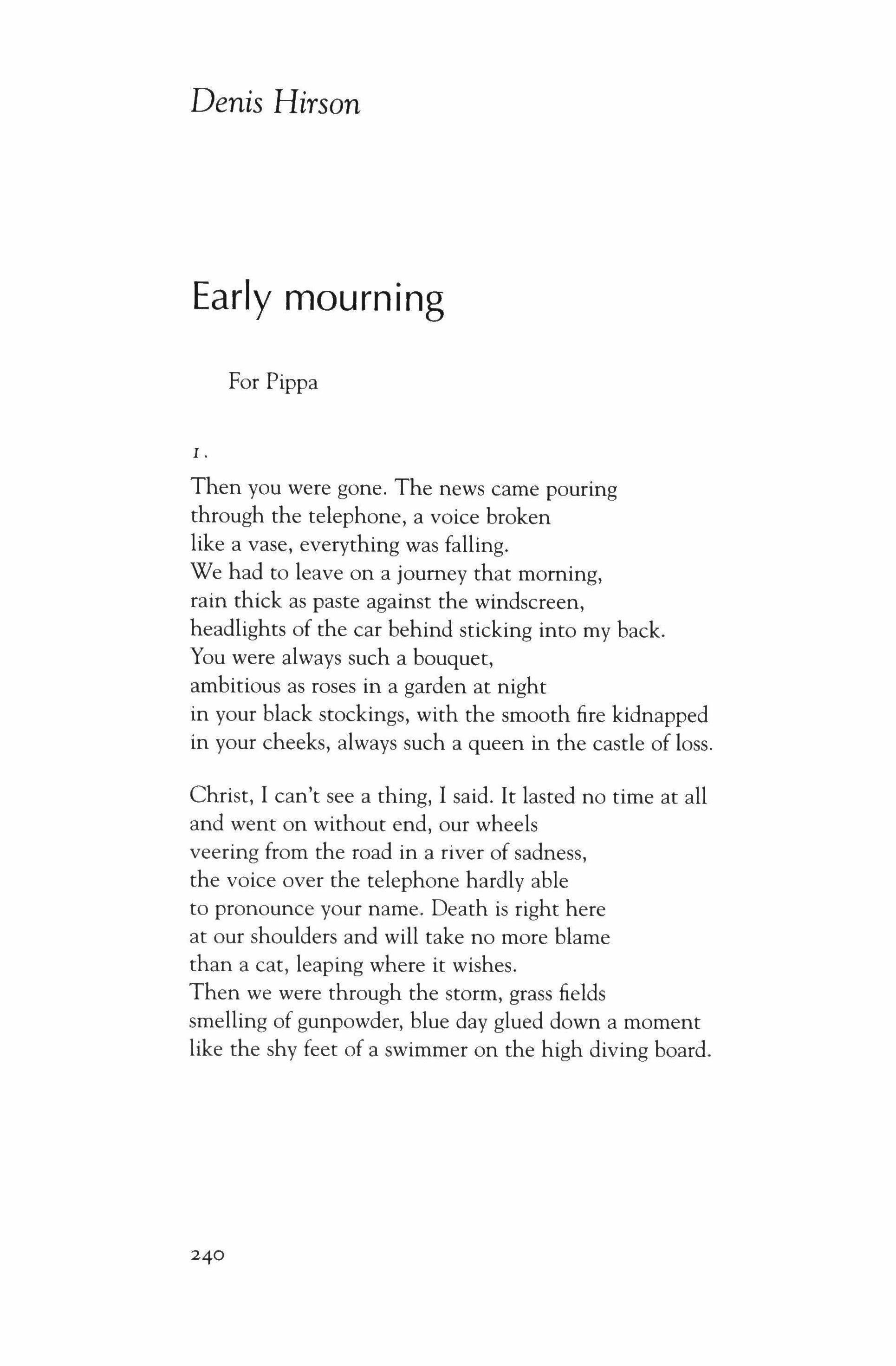
Early mourning
For Pippa
I.
Then you were gone. The news came pouring through the telephone, a voice broken like a vase, everything was falling. We had to leave on a journey that morning, rain thick as paste against the windscreen, headlights of the car behind sticking into my back. You were always such a bouquet, ambitious as roses in a garden at night in your black stockings, with the smooth fire kidnapped in your cheeks, always such a queen in the castle of loss.
Christ, I can't see a thing, I said. It lasted no time at all and went on without end, our wheels veering from the road in a river of sadness, the voice over the telephone hardly able to pronounce your name. Death is right here at our shoulders and will take no more blame than a cat, leaping where it wishes. Then we were through the storm, grass fields smelling of gunpowder, blue day glued down a moment like the shy feet of a swimmer on the high diving board.
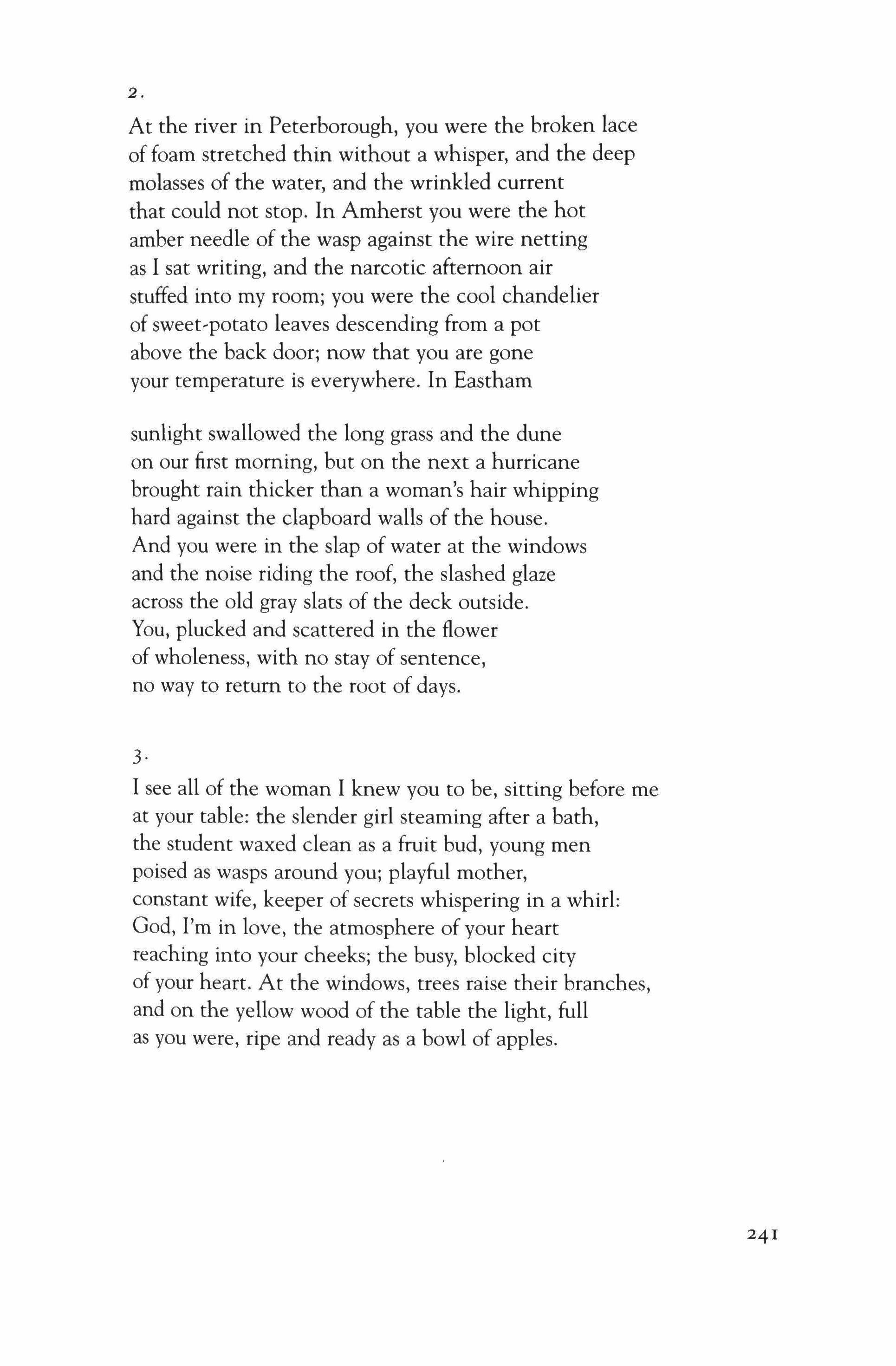
At the river in Peterborough, you were the broken lace of foam stretched thin without a whisper, and the deep molasses of the water, and the wrinkled current that could not stop. In Amherst you were the hot amber needle of the wasp against the wire netting as I sat writing, and the narcotic afternoon air stuffed into my room; you were the cool chandelier of sweet-potato leaves descending from a pot above the back door; now that you are gone your temperature is everywhere. In Eastham
sunlight swallowed the long grass and the dune on our first morning, but on the next a hurricane brought rain thicker than a woman's hair whipping hard against the clapboard walls of the house. And you were in the slap of water at the windows and the noise riding the roof, the slashed glaze across the old gray slats of the deck outside. You, plucked and scattered in the flower of wholeness, with no stay of sentence, no way to return to the root of days.
3·
I see all of the woman I knew you to be, sitting before me at your table: the slender girl steaming after a bath, the student waxed clean as a fruit bud, young men poised as wasps around you; playful mother, constant wife, keeper of secrets whispering in a whirl: God, I'm in love, the atmosphere of your heart reaching into your cheeks; the busy, blocked city of your heart. At the windows, trees raise their branches, and on the yellow wood of the table the light, full as you were, ripe and ready as a bowl of apples.
2.
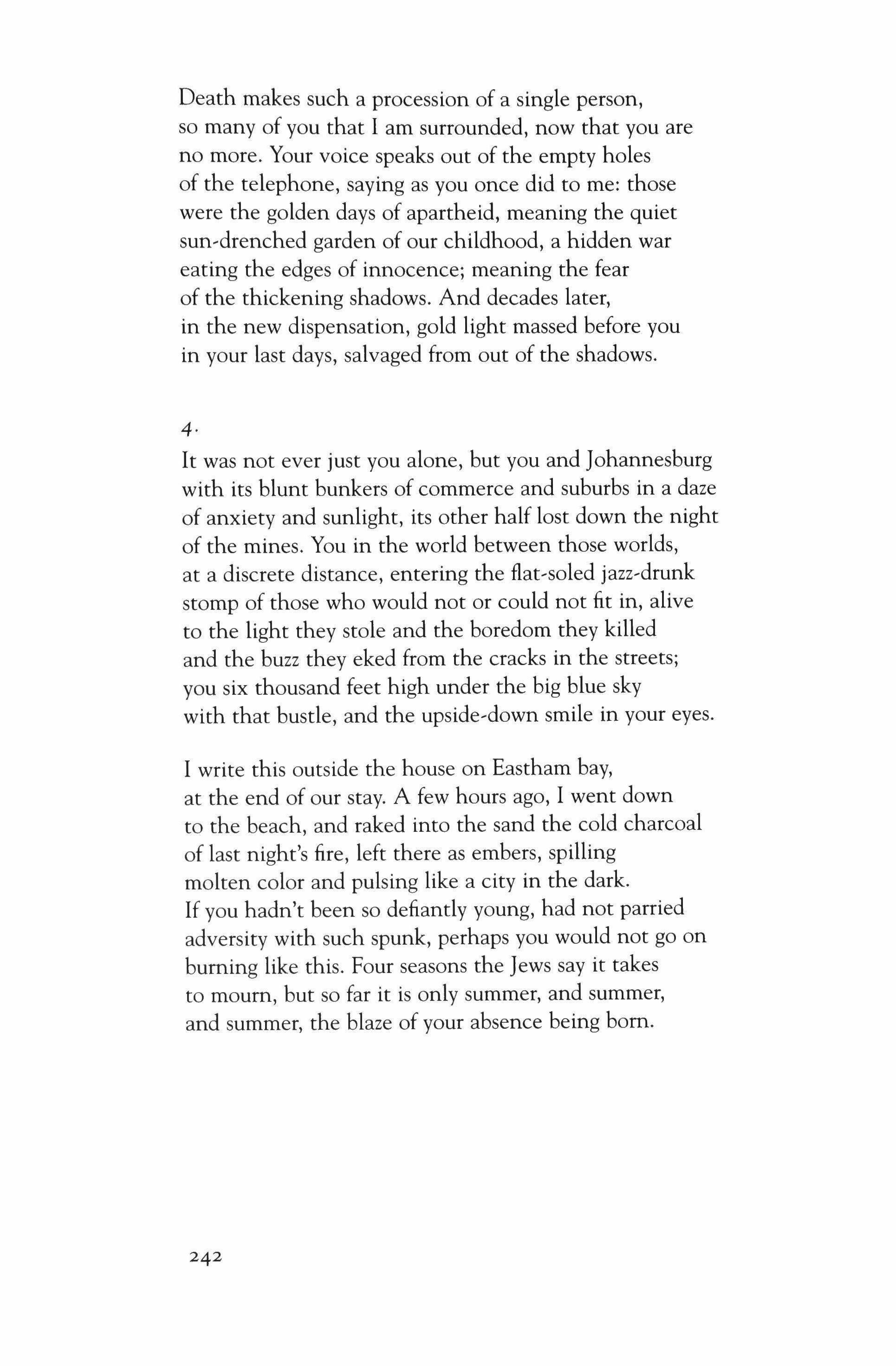
Death makes such a procession of a single person, so many of you that I am surrounded, now that you are no more. Your voice speaks out of the empty holes of the telephone, saying as you once did to me: those were the golden days of apartheid, meaning the quiet sun-drenched garden of our childhood, a hidden war eating the edges of innocence; meaning the fear of the thickening shadows. And decades later, in the new dispensation, gold light massed before you in your last days, salvaged from out of the shadows.
4· It was not ever just you alone, but you and Johannesburg with its blunt bunkers of commerce and suburbs in a daze of anxiety and sunlight, its other half lost down the night of the mines. You in the world between those worlds, at a discrete distance, entering the flat-soled jazz-drunk stomp of those who would not or could not fit in, alive to the light they stole and the boredom they killed and the buzz they eked from the cracks in the streets; you six thousand feet high under the big blue sky with that bustle, and the upside-down smile in your eyes.
I write this outside the house on Eastham bay, at the end of our stay. A few hours ago, I went down to the beach, and raked into the sand the cold charcoal of last night's fire, left there as embers, spilling molten color and pulsing like a city in the dark. If you hadn't been so defiantly young, had not parried adversity with such spunk, perhaps you would not go on burning like this. Four seasons the Jews say it takes to mourn, but so far it is only summer, and summer, and summer, the blaze of your absence being born.
John Barr
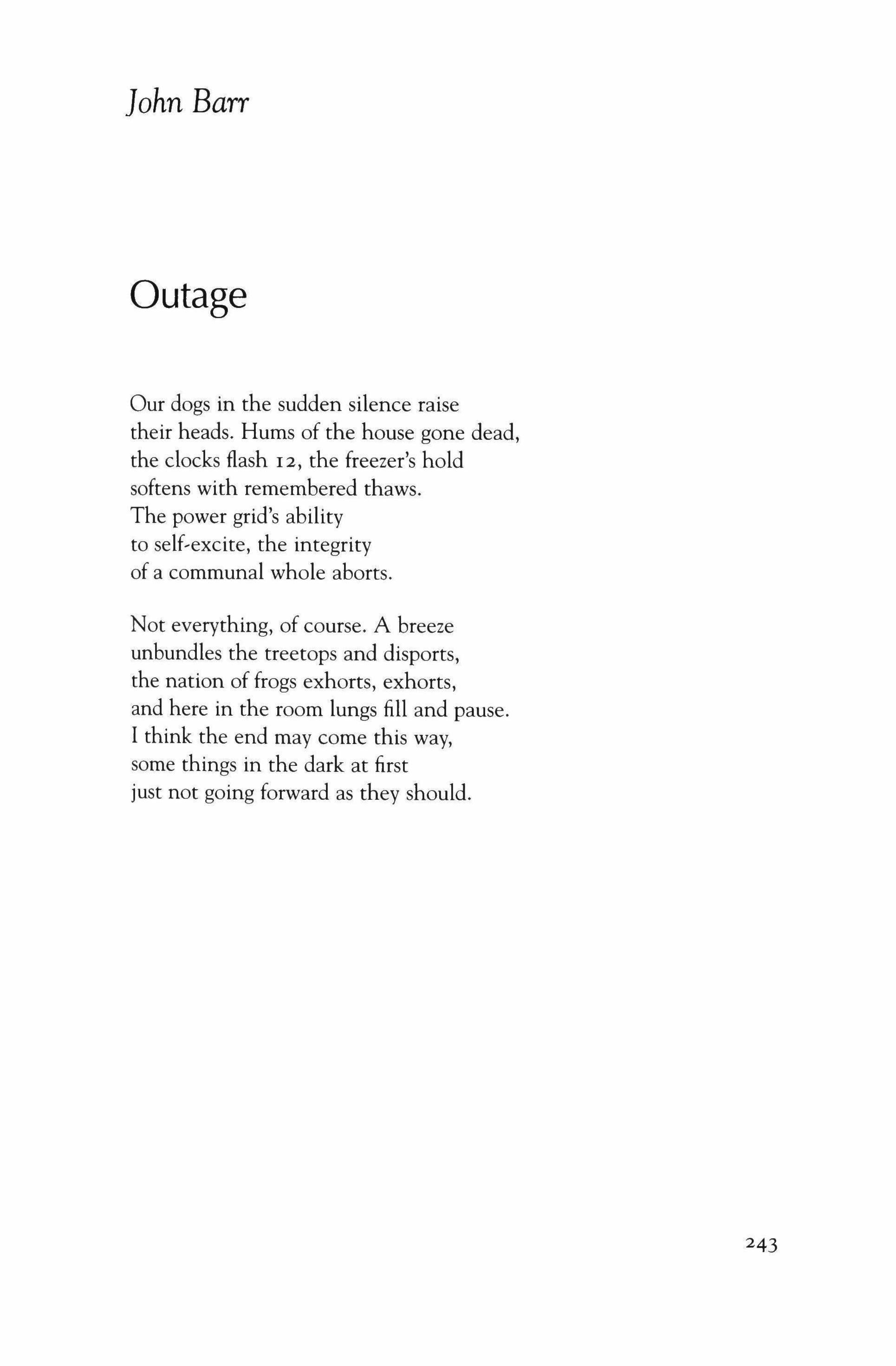
Outage
Our dogs in the sudden silence raise their heads. Hums of the house gone dead, the clocks flash 12, the freezer's hold softens with remembered thaws. The power grid's ability to self-excite, the integrity of a communal whole aborts.
Not everything, of course. A breeze unbundles the treetops and disports, the nation of frogs exhorts, exhorts, and here in the room lungs fill and pause. I think the end may come this way, some things in the dark at first just not going forward as they should.
243
Towns of South Dakota
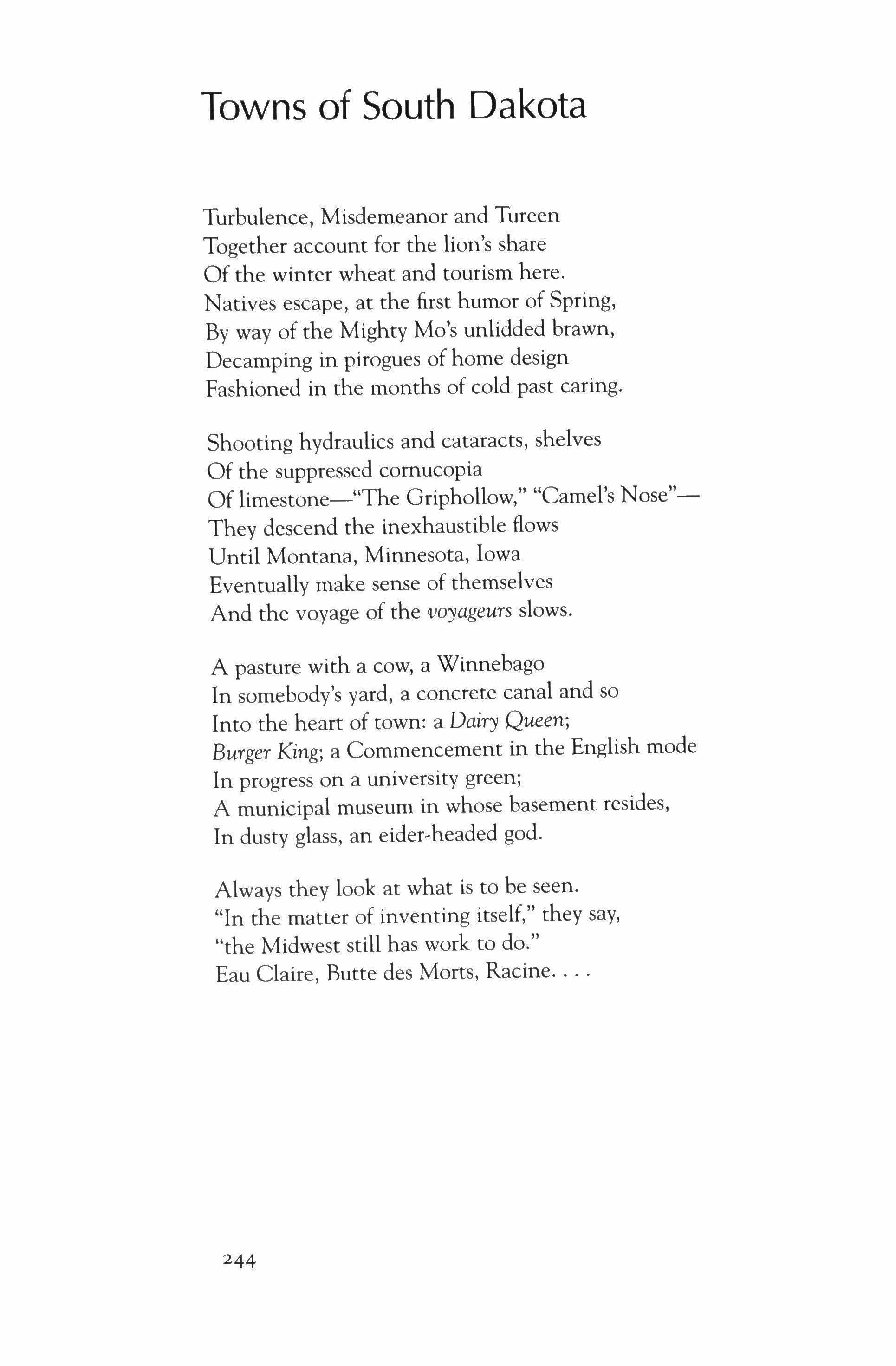
Turbulence, Misdemeanor and Tureen Together account for the lion's share
Of the winter wheat and tourism here.
Natives escape, at the first humor of Spring, By way of the Mighty Mo's unlidded brawn, Decamping in pirogues of home design
Fashioned in the months of cold past caring.
Shooting hydraulics and cataracts, shelves
Of the suppressed cornucopia
Of limestone-"The Griphollow," "Camel's Nose"They descend the inexhaustible flows
Until Montana, Minnesota, Iowa Eventually make sense of themselves And the voyage of the voyageurs slows.
A pasture with a cow, a Winnebago In somebody's yard, a concrete canal and so Into the heart of town: a Dairy Queen; Burger King; a Commencement in the English mode In progress on a university green; A municipal museum in whose basement resides, In dusty glass, an eider-headed god.
Always they look at what is to be seen. "In the matter of inventing itself," they say, "the Midwest still has work to do."
Eau Claire, Butte des Morts, Racine
244
Dropped

Released the pieces of the porcelain vase depart on paths they've waited to pursue since first enjoined to hold a shape in space: shrapnel to its own ballistics true.
245
Rick Barot
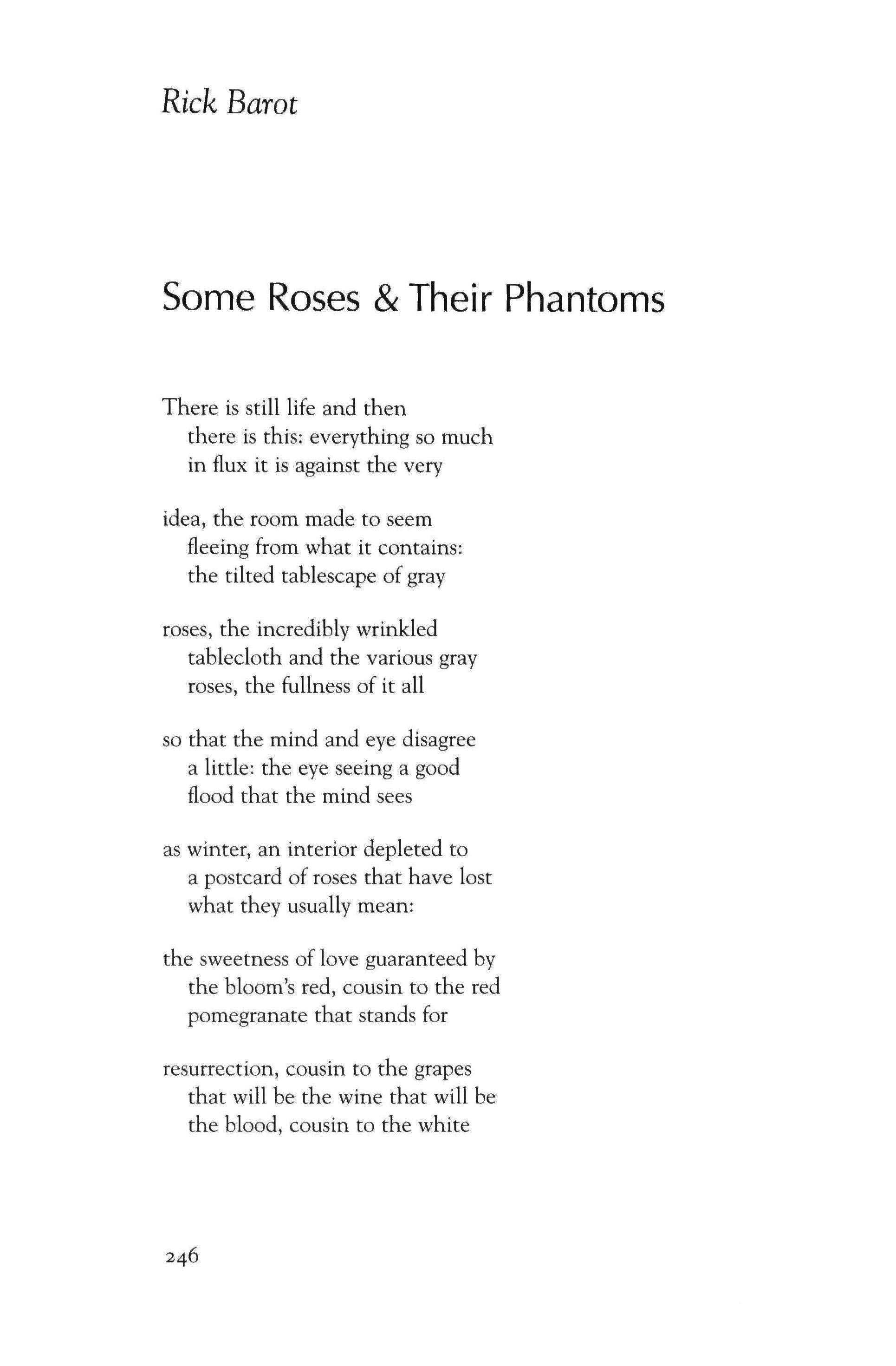
Some Roses & Their Phantoms
There is still life and then there is this: everything so much in flux it is against the very
idea, the room made to seem fleeing from what it contains: the tilted tablescape of gray
roses, the incredibly wrinkled tablecloth and the various gray roses, the fullness of it all
so that the mind and eye disagree a little: the eye seeing a good flood that the mind sees
as winter, an interior depleted to a postcard of roses that have lost what they usually mean:
the sweetness of love guaranteed by the bloom's red, cousin to the red pomegranate that stands for
resurrection, cousin to the grapes that will be the wine that will be the blood, cousin to the white
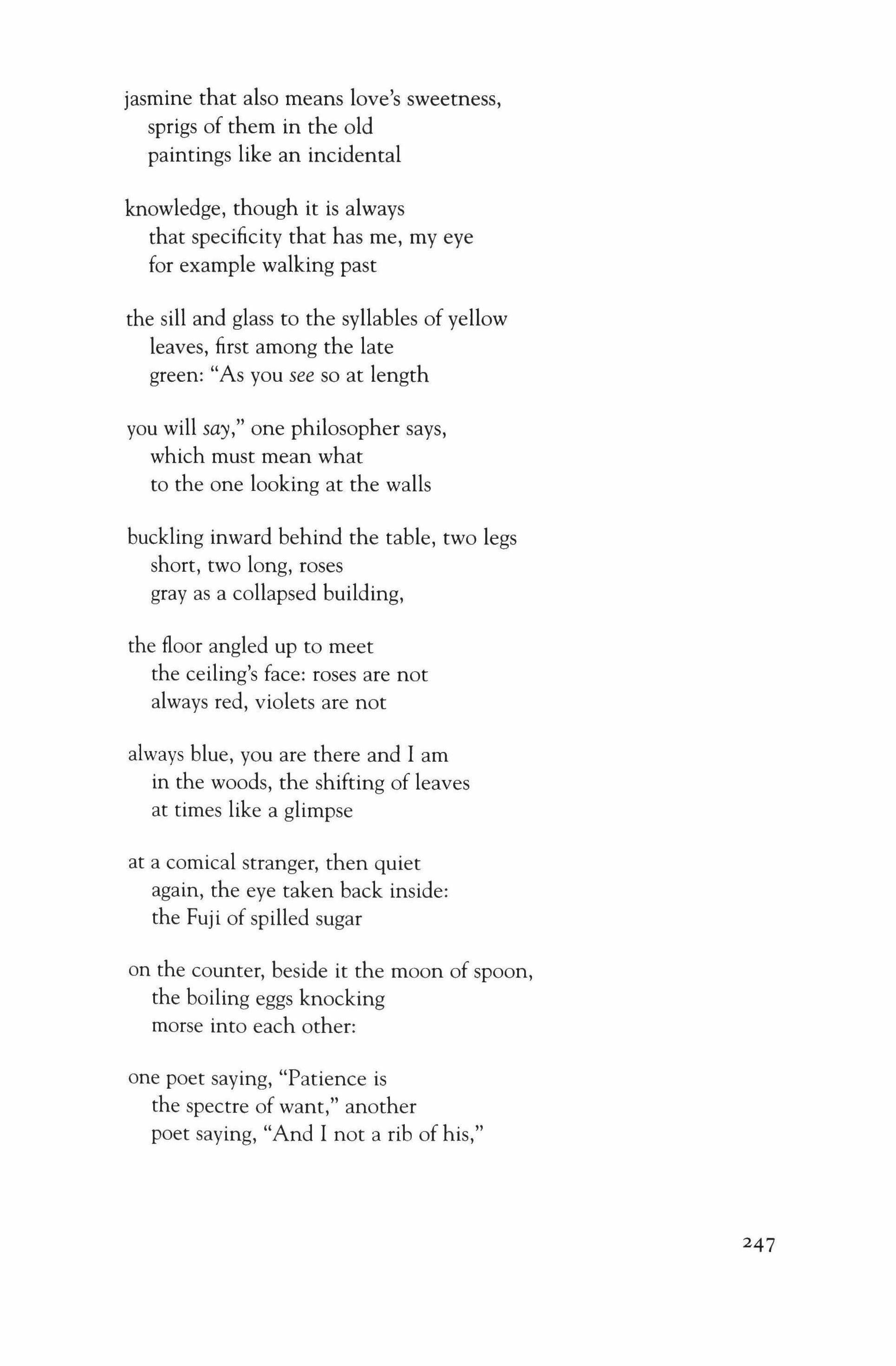
jasmine that also means love's sweetness, sprigs of them in the old paintings like an incidental
knowledge, though it is always that specificity that has me, my eye for example walking past
the sill and glass to the syllables of yellow leaves, first among the late green: "As you see so at length
you will say," one philosopher says, which must mean what to the one looking at the walls
buckling inward behind the table, two legs short, two long, roses gray as a collapsed building,
the floor angled up to meet the ceiling's face: roses are not always red, violets are not
always blue, you are there and I am in the woods, the shifting of leaves at times like a glimpse
at a comical stranger, then quiet again, the eye taken back inside: the Fuji of spilled sugar
on the counter, beside it the moon of spoon, the boiling eggs knocking morse into each other:
one poet saying, "Patience is the spectre of want," another poet saying, "And I not a rib of his,"
247
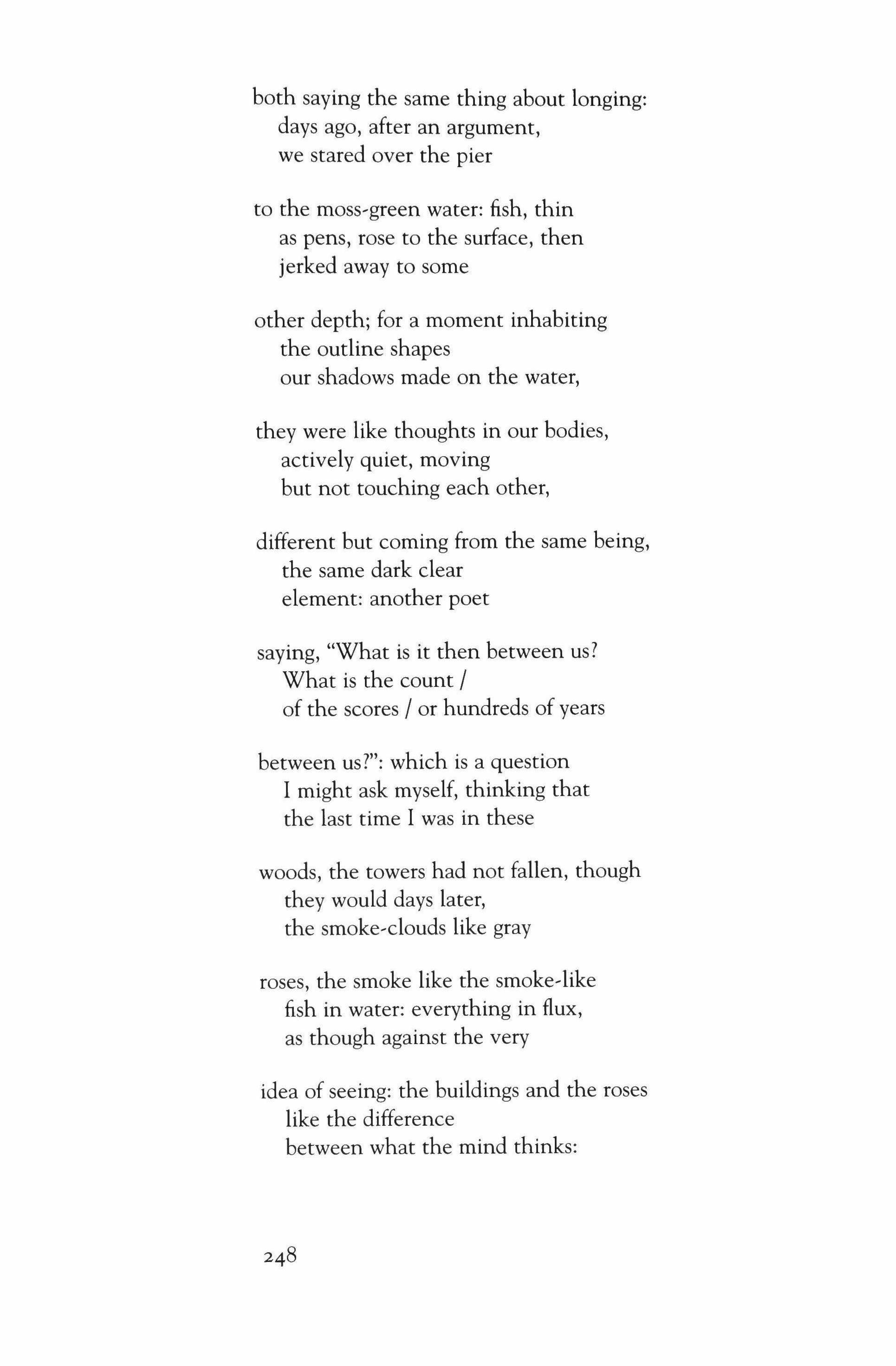
both saying the same thing about longing: days ago, after an argument, we stared over the pier
to the moss-green water: fish, thin as pens, rose to the surface, then jerked away to some other depth; for a moment inhabiting the outline shapes our shadows made on the water, they were like thoughts in our bodies, actively quiet, moving but not touching each other, different but coming from the same being, the same dark clear element: another poet saying, "What is it then between us? What is the count / of the scores / or hundreds of years between us?": which is a question I might ask myself, thinking that the last time I was in these woods, the towers had not fallen, though they would days later, the smoke-clouds like gray roses, the smoke like the smoke-like fish in water: everything in flux, as though against the very idea of seeing: the buildings and the roses like the difference between what the mind thinks:
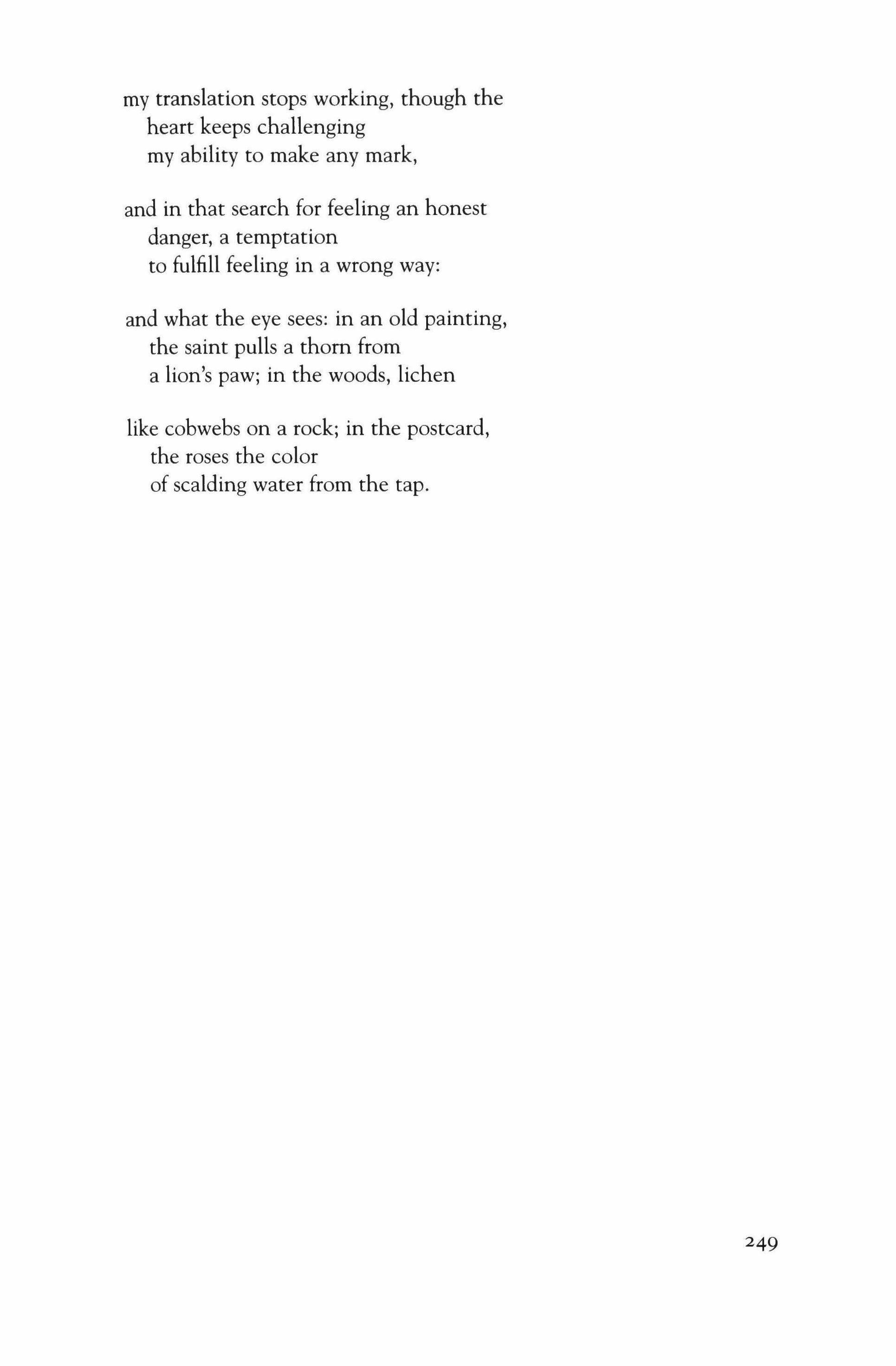
my translation stops working, though the heart keeps challenging my ability to make any mark,
and in that search for feeling an honest danger, a temptation to fulfill feeling in a wrong way: and what the eye sees: in an old painting, the saint pulls a thorn from a lion's paw; in the woods, lichen like cobwebs on a rock; in the postcard, the roses the color of scalding water from the tap.
249
Black Canvas
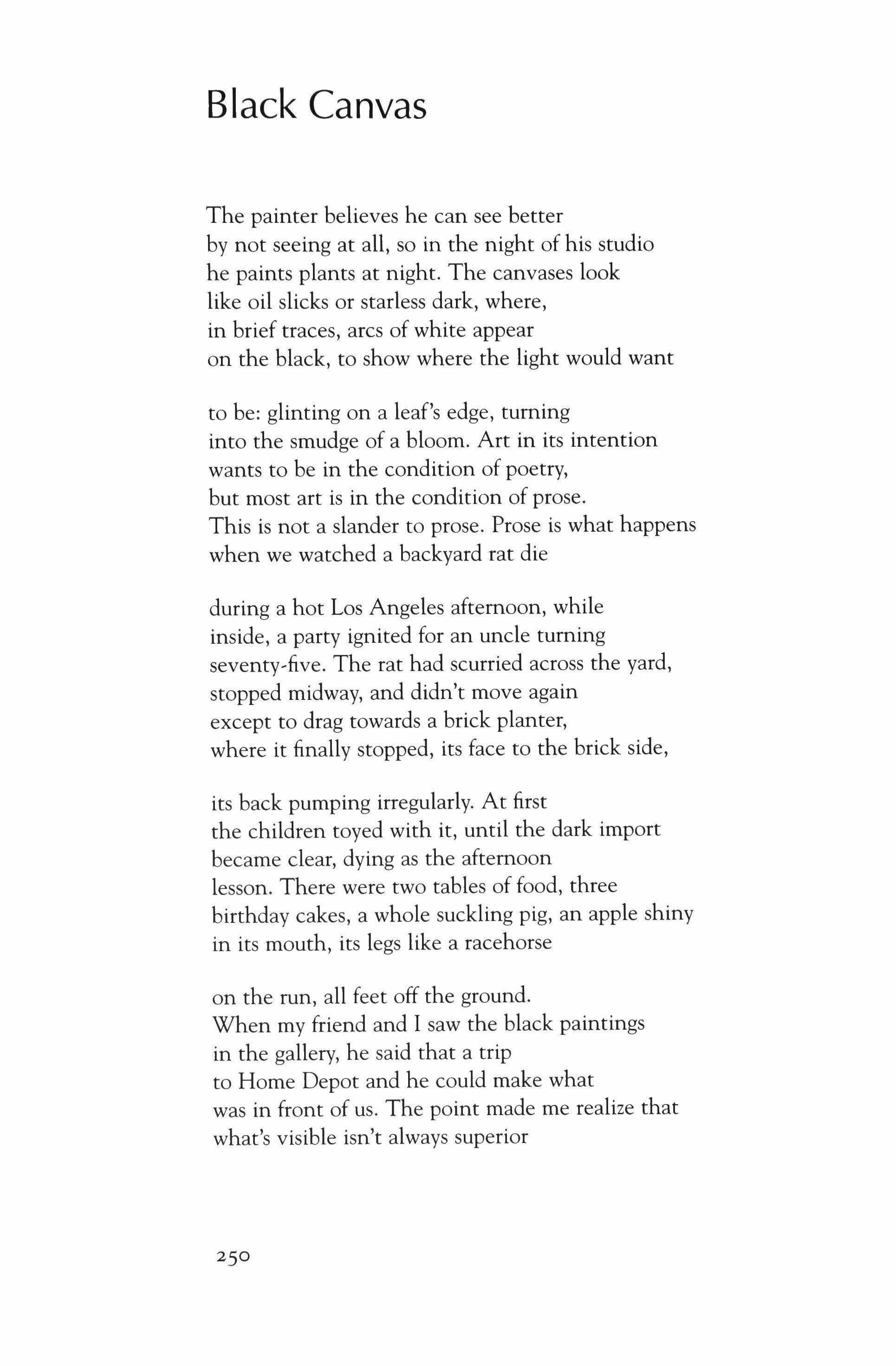
The painter believes he can see better by not seeing at all, so in the night of his studio he paints plants at night. The canvases look like oil slicks or starless dark, where, in brief traces, arcs of white appear on the black, to show where the light would want
to be: glinting on a leaf's edge, turning into the smudge of a bloom. Art in its intention wants to be in the condition of poetry, but most art is in the condition of prose. This is not a slander to prose. Prose is what happens when we watched a backyard rat die
during a hot Los Angeles afternoon, while inside, a party ignited for an uncle turning seventy-five. The rat had scurried across the yard, stopped midway, and didn't move again except to drag towards a brick planter, where it finally stopped, its face to the brick side,
its back pumping irregularly. At first the children toyed with it, until the dark import became clear, dying as the afternoon lesson. There were two tables of food, three birthday cakes, a whole suckling pig, an apple shiny in its mouth, its legs like a racehorse
on the run, all feet off the ground. When my friend and I saw the black paintings in the gallery, he said that a trip to Home Depot and he could make what was in front of us. The point made me realize that what's visible isn't always superior
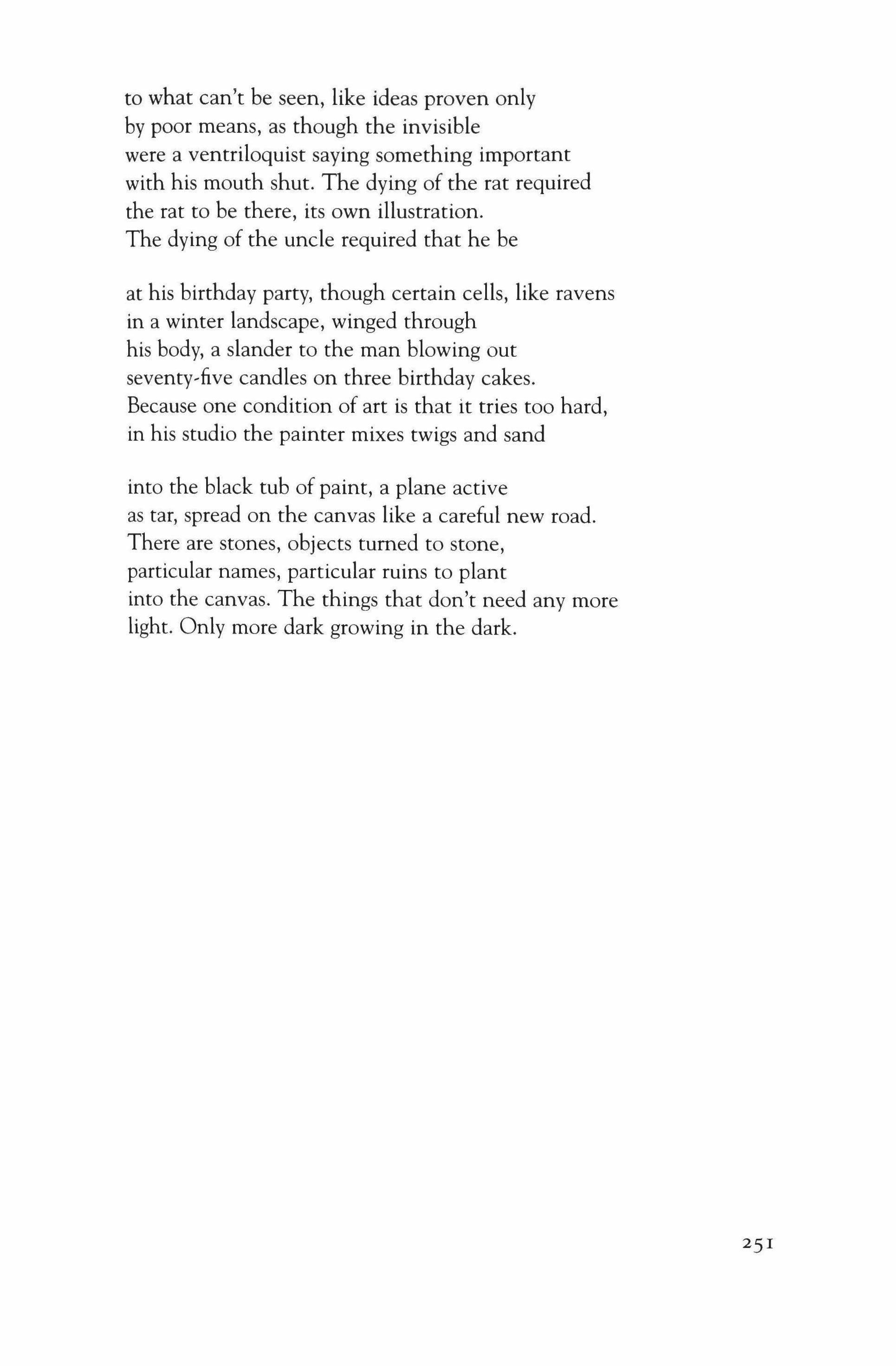
to what can't be seen, like ideas proven only by poor means, as though the invisible were a ventriloquist saying something important with his mouth shut. The dying of the rat required the rat to be there, its own illustration. The dying of the uncle required that he be
at his birthday party, though certain cells, like ravens in a winter landscape, winged through his body, a slander to the man blowing out seventy-five candles on three birthday cakes. Because one condition of art is that it tries too hard, in his studio the painter mixes twigs and sand
into the black tub of paint, a plane active as tar, spread on the canvas like a careful new road. There are stones, objects turned to stone, particular names, particular ruins to plant into the canvas. The things that don't need any more light. Only more dark growing in the dark.
Victoria Chang
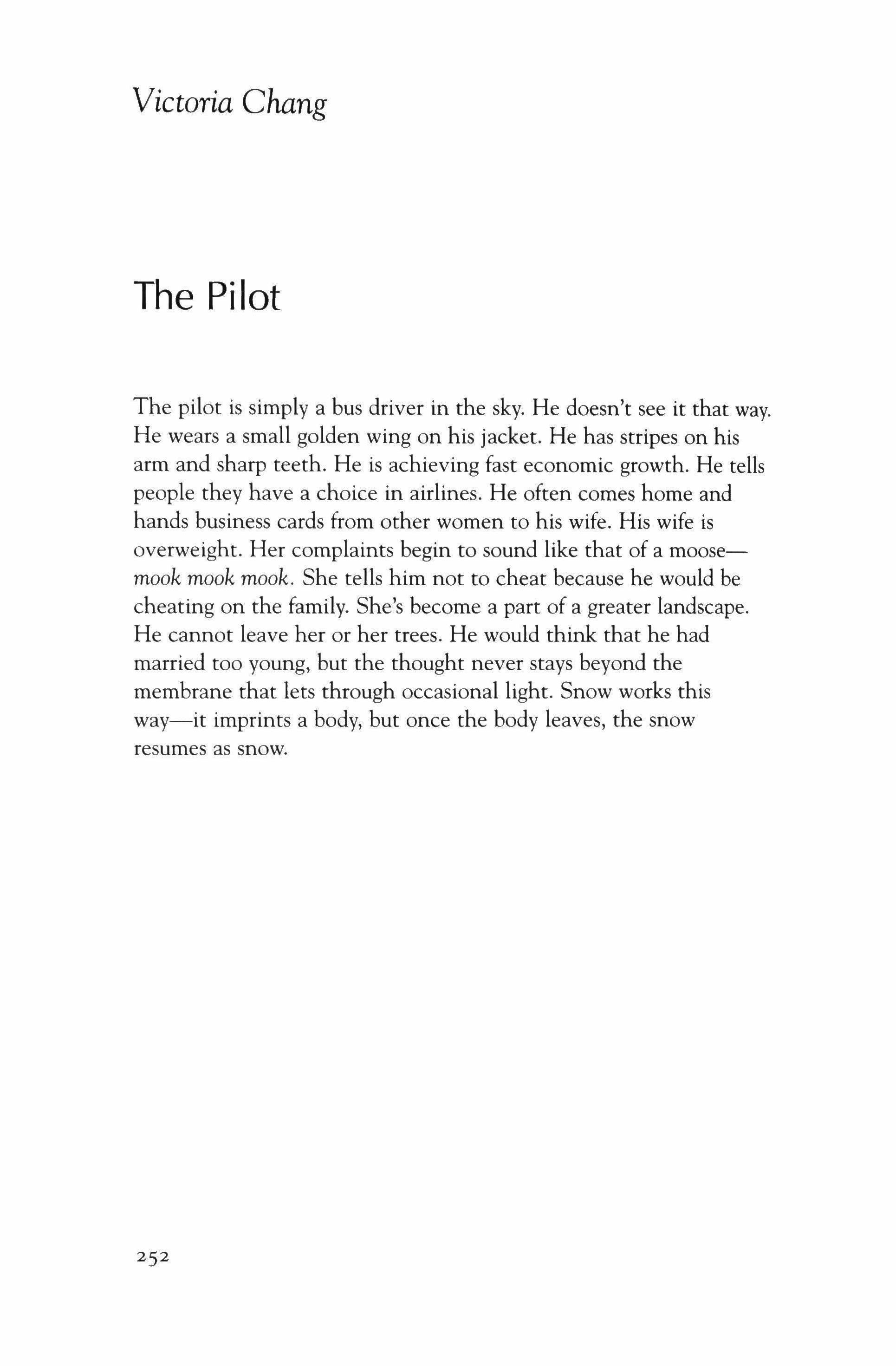
The Pilot
The pilot is simply a bus driver in the sky. He doesn't see it that way. He wears a small golden wing on his jacket. He has stripes on his arm and sharp teeth. He is achieving fast economic growth. He tells people they have a choice in airlines. He often comes home and hands business cards from other women to his wife. His wife is overweight. Her complaints begin to sound like that of a moosemook mook mook. She tells him not to cheat because he would be cheating on the family. She's become a part of a greater landscape. He cannot leave her or her trees. He would think that he had married too young, but the thought never stays beyond the membrane that lets through occasional light. Snow works this way-it imprints a body, but once the body leaves, the snow resumes as snow.
The Accident
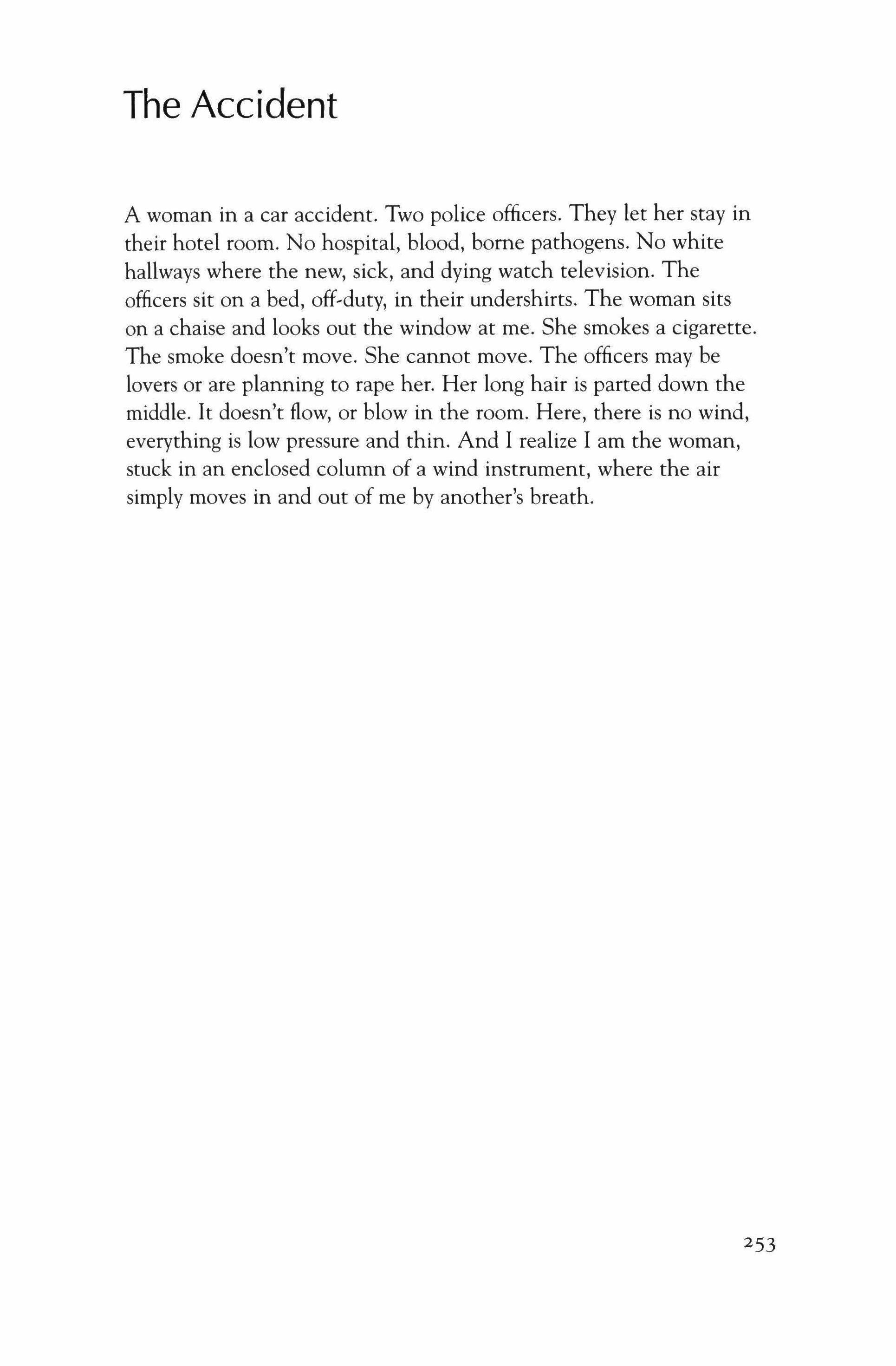
A woman in a car accident. Two police officers. They let her stay in their hotel room. No hospital, blood, borne pathogens. No white hallways where the new, sick, and dying watch television. The officers sit on a bed, off-duty, in their undershirts. The woman sits on a chaise and looks out the window at me. She smokes a cigarette. The smoke doesn't move. She cannot move. The officers may be lovers or are planning to rape her. Her long hair is parted down the middle. It doesn't flow, or blow in the room. Here, there is no wind, everything is low pressure and thin. And I realize I am the woman, stuck in an enclosed column of a wind instrument, where the air simply moves in and out of me by another's breath.
253
David Yezzi
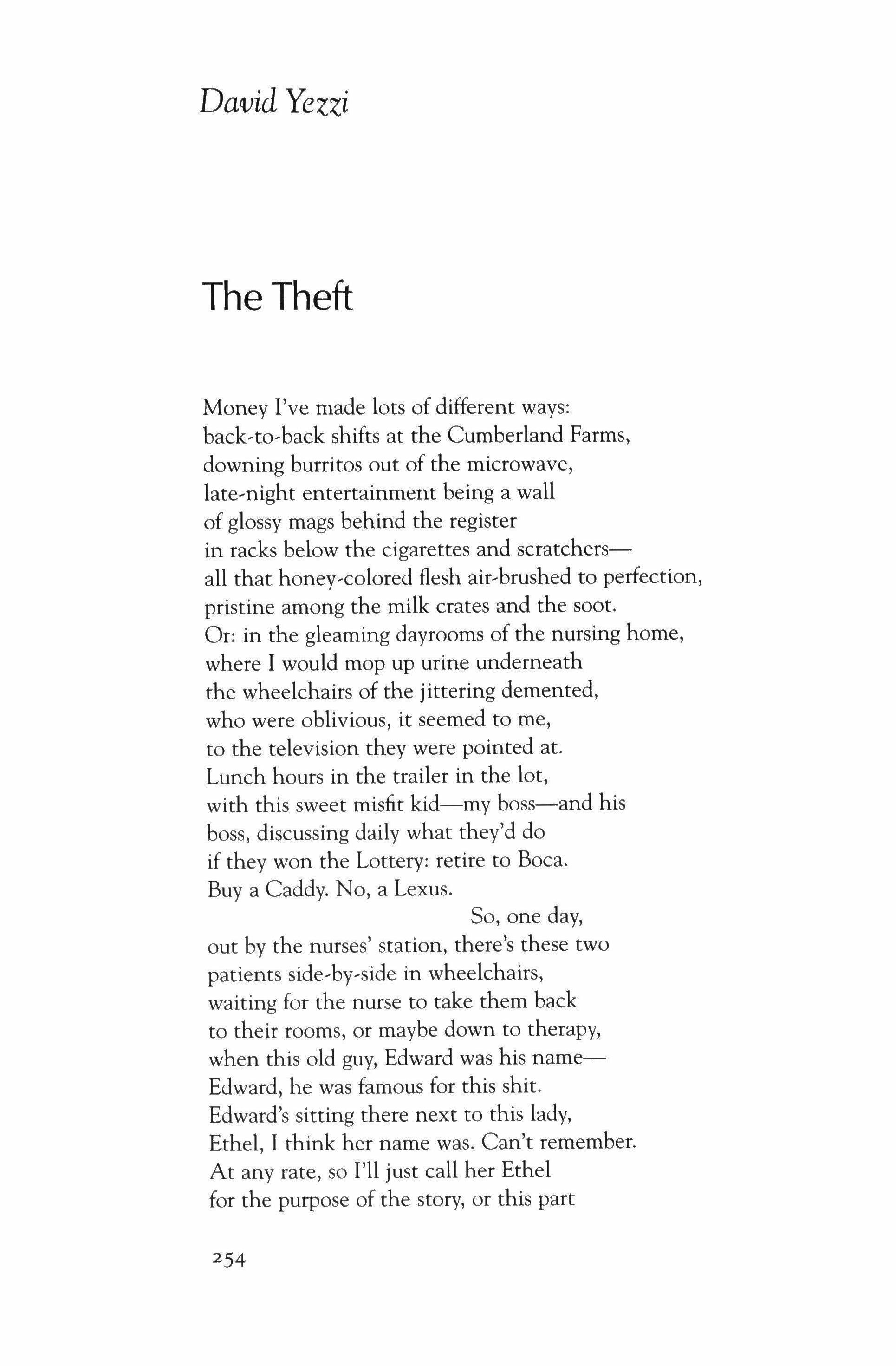
The Theft
Money I've made lots of different ways: back-co-back shifts at the Cumberland Farms, downing burritos out of the microwave, late-night entertainment being a wall of glossy mags behind the register in racks below the cigarettes and scratchersall that honey-colored flesh air-brushed to perfection, pristine among the milk crates and the soot. Or: in the gleaming dayrooms of the nursing home, where I would mop up urine underneath the wheelchairs of the jittering demented, who were oblivious, it seemed to me, to the television they were pointed at. Lunch hours in the trailer in the lot, with this sweet misfit kid-my boss-and his boss, discussing daily what they'd do if they won the Lottery: retire to Boca. Buy a Caddy. No, a Lexus.
So, one day, out by the nurses' station, there's these two patients side-by-side in wheelchairs, waiting for the nurse to take them back to their rooms, or maybe down to therapy, when this old guy, Edward was his nameEdward, he was famous for this shit. Edward's sitting there next to this lady, Ethel, I think her name was. Can't remember. At any rate, so I'll just call her Ethel for the purpose of the story, or this part
254
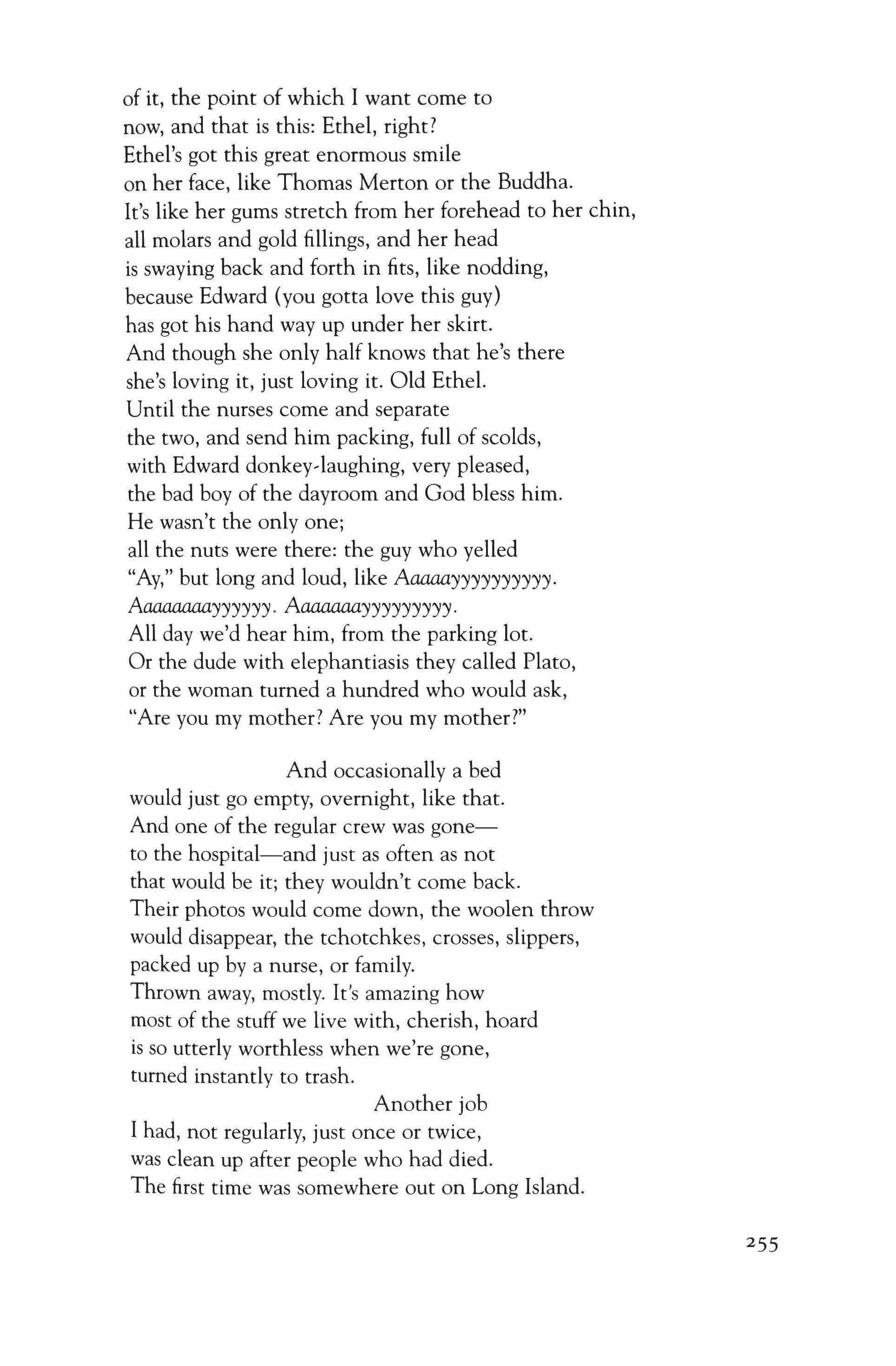
of it, the point of which I want come to now, and that is this: Ethel, right? Ethel's got this great enormous smile on her face, like Thomas Merton or the Buddha. It's like her gums stretch from her forehead to her chin, all molars and gold fillings, and her head is swaying back and forth in fits, like nodding, because Edward (you gotta love this guy) has got his hand way up under her skirt. And though she only half knows that he's there she's loving it, just loving it. Old Ethel. Until the nurses come and separate the two, and send him packing, full of scolds, with Edward donkey-laughing, very pleased, the bad boy of the dayroom and God bless him. He wasn't the only one; all the nuts were there: the guy who yelled "Ay," but long and loud, like Aaaaayyyyyyyyyy. Aaaaaaoayyyyyy. Amryyyyyyyyy. All day we'd hear him, from the parking lot. Or the dude with elephantiasis they called Plato, or the woman turned a hundred who would ask, "Are you my mother? Are you my mother?"
And occasionally a bed would just go empty, overnight, like that. And one of the regular crew was goneto the hospital-and just as often as not that would be it; they wouldn't come back. Their photos would come down, the woolen throw would disappear, the tchotchkes, crosses, slippers, packed up by a nurse, or family. Thrown away, mostly. It's amazing how most of the stuff we live with, cherish, hoard is so utterly worthless when we're gone, turned instantly to trash.
Another job
I had, not regularly, just once or twice, was clean up after people who had died. The first time was somewhere out on Long Island.
255
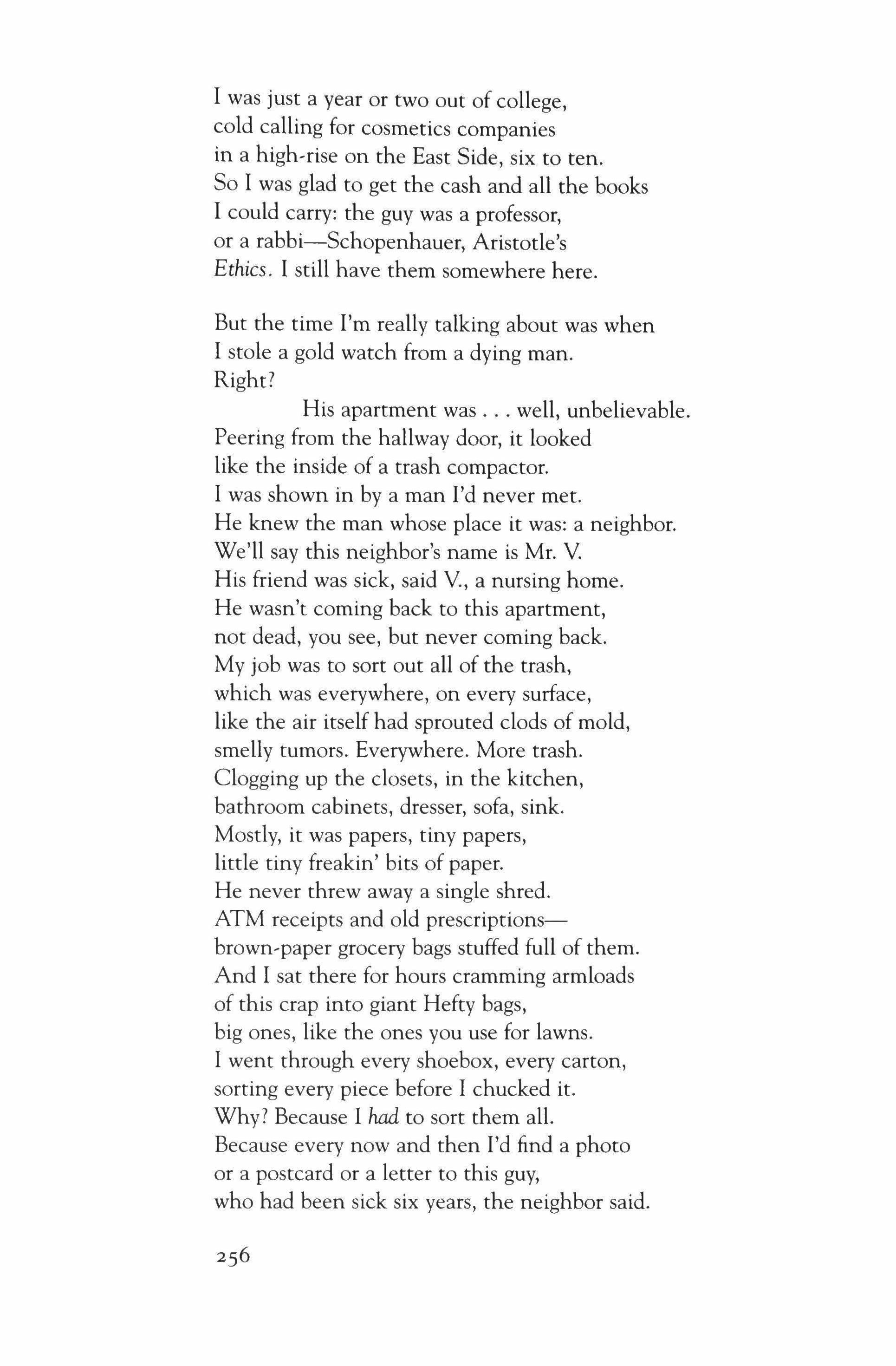
I was just a year or two out of college, cold calling for cosmetics companies in a high-rise on the East Side, six to ten. So I was glad to get the cash and all the books I could carry: the guy was a professor, or a rabbi-Schopenhauer, Aristotle's Ethics. I still have them somewhere here.
But the time I'm really talking about was when I stole a gold watch from a dying man. Right?
His apartment was well, unbelievable. Peering from the hallway door, it looked like the inside of a trash compactor.
I was shown in by a man I'd never met. He knew the man whose place it was: a neighbor. We'll say this neighbor's name is Mr. V. His friend was sick, said v., a nursing home. He wasn't coming back to this apartment, not dead, you see, but never coming back. My job was to sort out all of the trash, which was everywhere, on every surface, like the air itself had sprouted clods of mold, smelly tumors. Everywhere. More trash. Clogging up the closets, in the kitchen, bathroom cabinets, dresser, sofa, sink. Mostly, it was papers, tiny papers, little tiny freakin' bits of paper. He never threw away a single shred. ATM receipts and old prescriptionsbrown-paper grocery bags stuffed full of them. And I sat there for hours cramming armloads of this crap into giant Hefty bags, big ones, like the ones you use for lawns. I went through every shoebox, every carton, sorting every piece before I chucked it. Why? Because I had to sort them all. Because every now and then I'd find a photo or a postcard or a letter to this guy, who had been sick six years, the neighbor said.
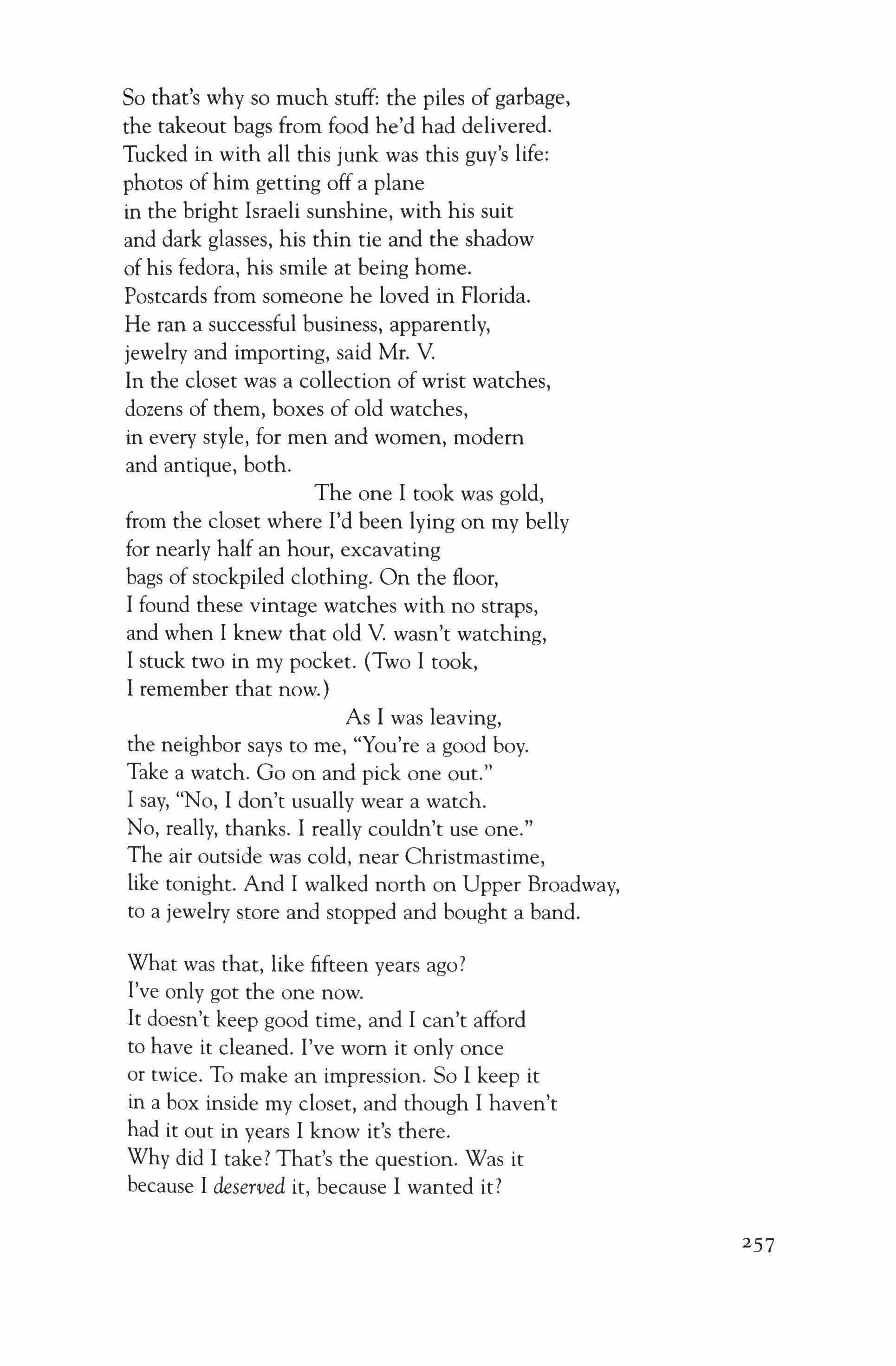
So that's why so much stuff: the piles of garbage, the takeout bags from food he'd had delivered. Tucked in with all this junk was this guy's life: photos of him getting off a plane in the bright Israeli sunshine, with his suit and dark glasses, his thin tie and the shadow of his fedora, his smile at being home. Postcards from someone he loved in Florida. He ran a successful business, apparently, jewelry and importing, said Mr. V. In the closet was a collection of wrist watches, dozens of them, boxes of old watches, in every style, for men and women, modem and antique, both.
The one I took was gold, from the closet where I'd been lying on my belly for nearly half an hour, excavating bags of stockpiled clothing. On the floor, I found these vintage watches with no straps, and when I knew that old V. wasn't watching, I stuck two in my pocket. (Two I took, I remember that now.)
As I was leaving, the neighbor says to me, "You're a good boy. Take a watch. Go on and pick one out." I say, "No, I don't usually wear a watch. No, really, thanks. I really couldn't use one."
The air outside was cold, near Christmastime, like tonight. And I walked north on Upper Broadway, to a jewelry store and stopped and bought a band.
What was that, like fifteen years ago?
I've only got the one now. It doesn't keep good time, and I can't afford to have it cleaned. I've worn it only once or twice. To make an impression. So I keep it in a box inside my closet, and though I haven't had it out in years I know it's there. Why did I take? That's the question. Was it because I deserved it, because I wanted it?
257
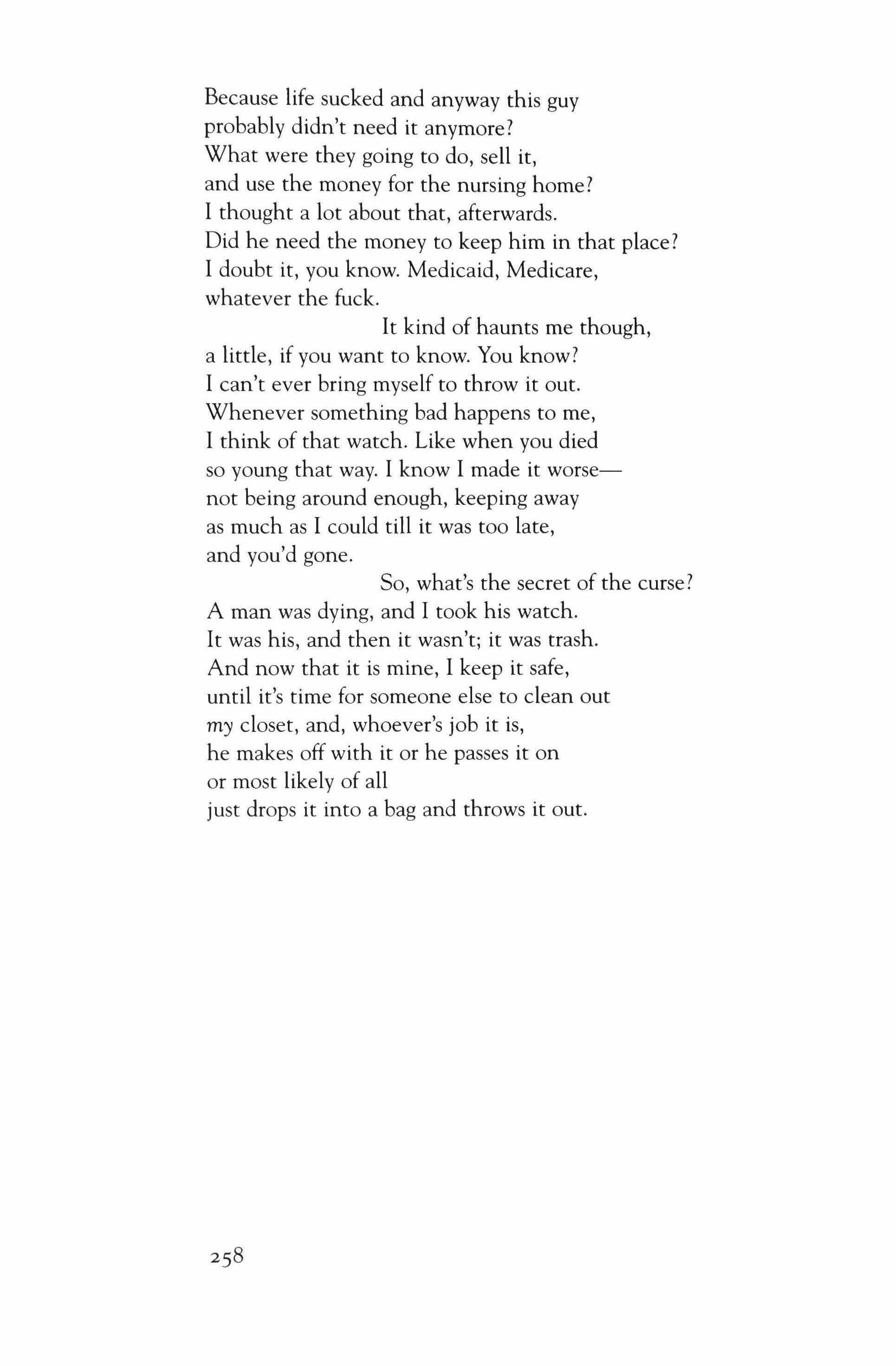
Because life sucked and anyway this guy probably didn't need it anymore? What were they going to do, sell it, and use the money for the nursing home? I thought a lot about that, afterwards. Did he need the money to keep him in that place? I doubt it, you know. Medicaid, Medicare, whatever the fuck.
It kind of haunts me though, a little, if you want to know. You know? I can't ever bring myself to throw it out. Whenever something bad happens to me, I think of that watch. Like when you died so young that way. I know I made it worsenot being around enough, keeping away as much as I could till it was too late, and you'd gone.
So, what's the secret of the curse?
A man was dying, and I took his watch. It was his, and then it wasn't; it was trash. And now that it is mine, I keep it safe, until it's time for someone else to clean out my closet, and, whoever's job it is, he makes off with it or he passes it on or most likely of all just drops it into a bag and throws it out.
Bruce Bond

Ode to a Pair of Spectacles
Folded on my desk, you stare with the wide and empty eyes if no one, just the impartial gaze of the headless, no pupil, no tunnel, no target, no bloom. I am lost without you.
You the anonymous, and yet the outline of the incognito. I watch you float on the invisible man, peering into the night light of televisions, their eyes fluttering against your lenses.
All those times I couldn't find you to find you. Such crystal pools I cannot pass my fingers through. That is for the light, the world. That is for the words you read, the spy-cipher of the eye chart.
You yourself are a language. You take me far, or close to far. And like a word, I rarely see you when I'm seeing through. What eye would be the moon that turns to map its darker side.
259

To use you is to rarely know you are there, save in the stray glint that is a small fire in the comer. In truth you are nothing without fire, the kind that bums the bush it never bums, or gilds the wing
in a Book of Hours. And as the smoke of age takes me over, slowly, you grow thicker, stronger, more extreme. Somewhere in the distance, the flustered flags of oaks and maples. Send help, they say, their colors flaming, waving to be seen.
Harvest
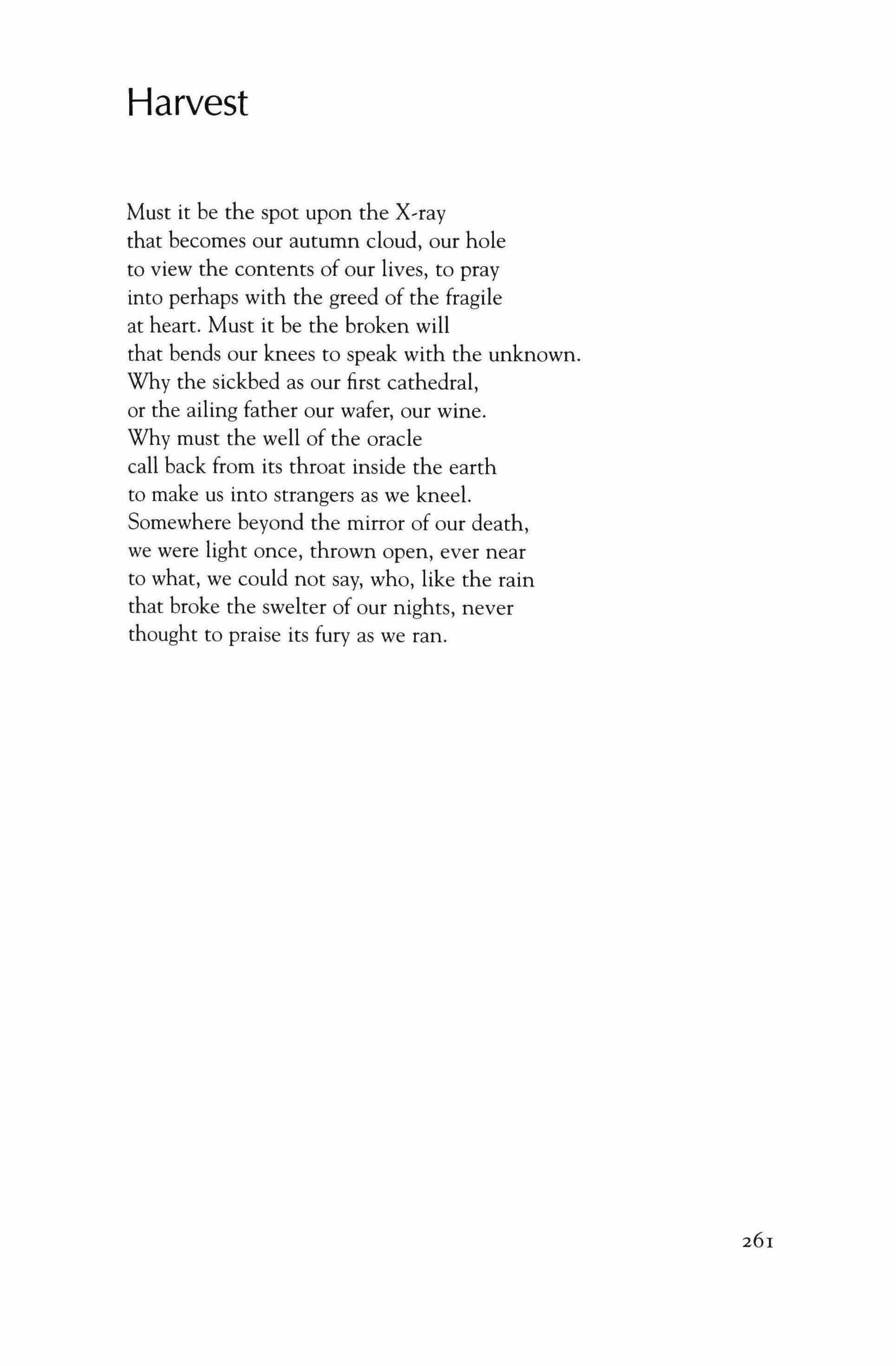
Must it be the spot upon the Xvrav that becomes our autumn cloud, our hole to view the contents of our lives, to pray into perhaps with the greed of the fragile at heart. Must it be the broken will that bends our knees to speak with the unknown. Why the sickbed as our first cathedral, or the ailing father our wafer, our wine. Why must the well of the oracle call back from its throat inside the earth to make us into strangers as we kneel. Somewhere beyond the mirror of our death, we were light once, thrown open, ever near to what, we could not say, who, like the rain that broke the swelter of our nights, never thought to praise its fury as we ran.
Homage to the Left Hand
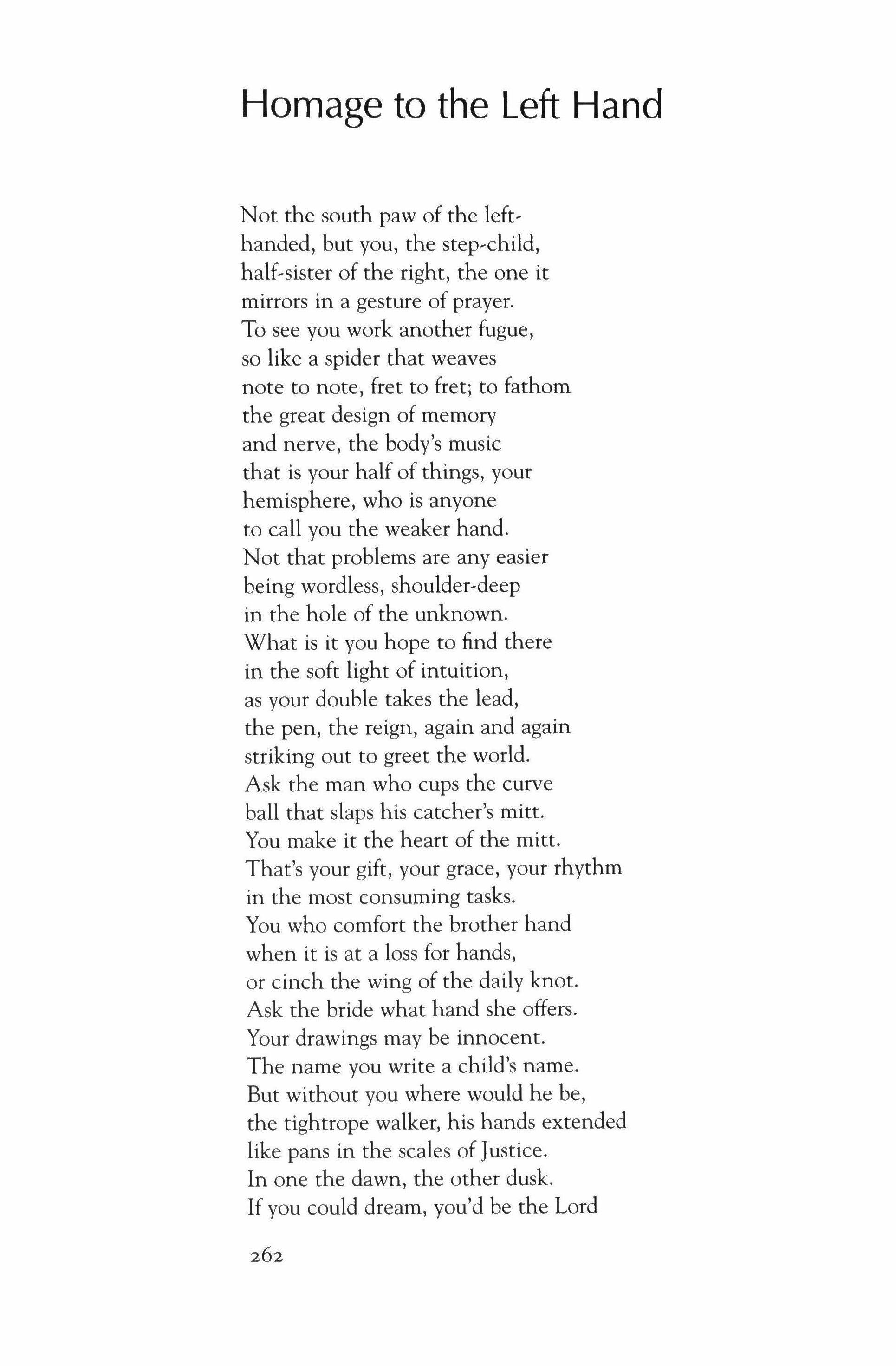
Not the south paw of the lefthanded, but you, the step-child, half-sister of the right, the one it mirrors in a gesture of prayer. To see you work another fugue, so like a spider that weaves note to note, fret to fret; to fathom the great design of memory and nerve, the body's music that is your half of things, your hemisphere, who is anyone to call you the weaker hand. Not that problems are any easier being wordless, shoulder-deep in the hole of the unknown. What is it you hope to find there in the soft light of intuition, as your double takes the lead, the pen, the reign, again and again striking out to greet the world. Ask the man who cups the curve ball that slaps his catcher's mitt. You make it the heart of the mitt. That's your gift, your grace, your rhythm in the most consuming tasks. You who comfort the brother hand when it is at a loss for hands, or cinch the wing of the daily knot. Ask the bride what hand she offers. Your drawings may be innocent. The name you write a child's name. But without you where would he be, the tightrope walker, his hands extended like pans in the scales of Justice. In one the dawn, the other dusk. If you could dream, you'd be the Lord
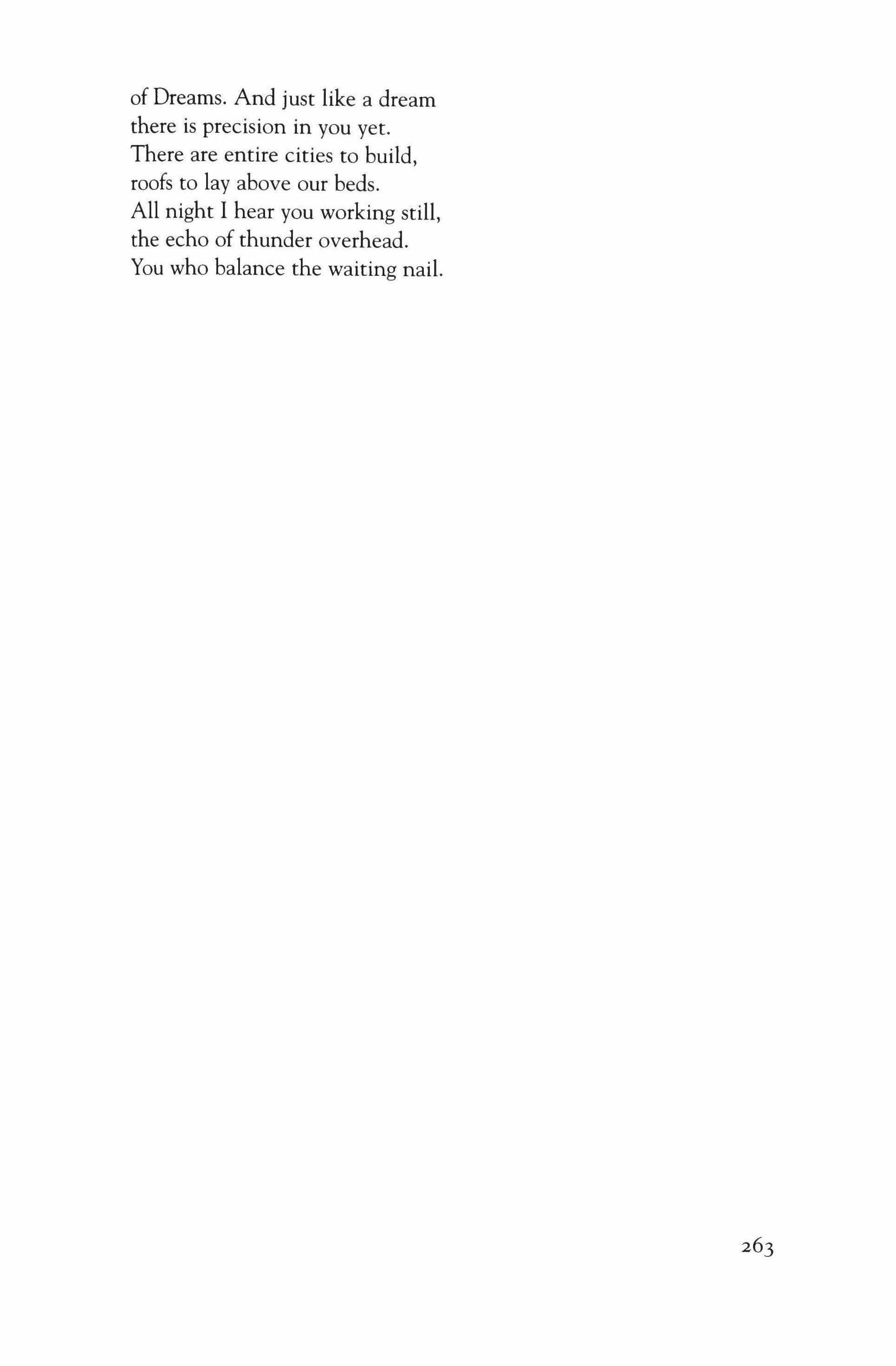
of Dreams. And just like a dream there is precision in you yet. There are entire cities to build, roofs to lay above our beds.
All night I hear you working still, the echo of thunder overhead. You who balance the waiting nail.
Ales Steger
Translated from the Slovenian by Brian
Henry
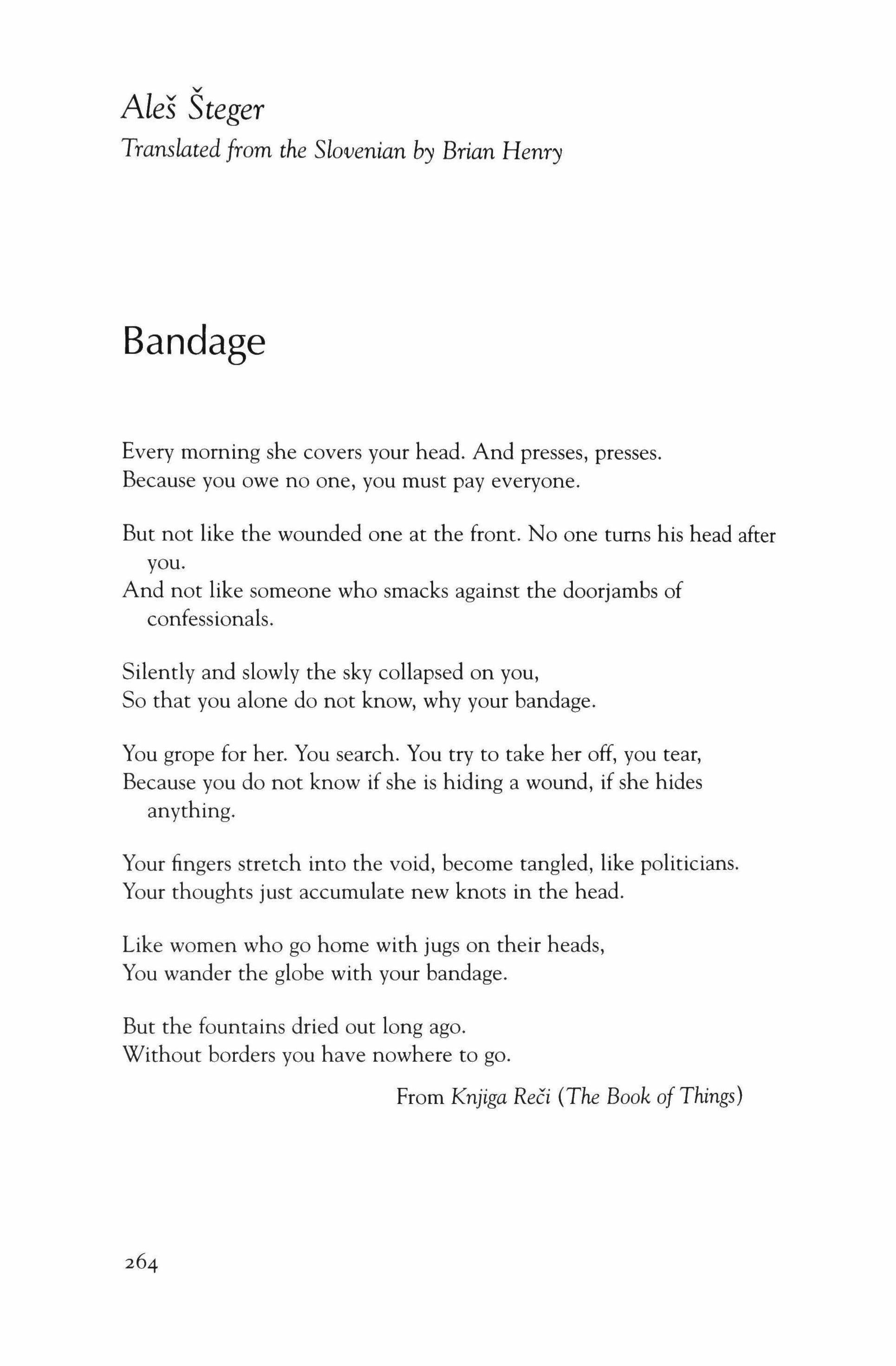
Bandage
Every morning she covers your head. And presses, presses. Because you owe no one, you must pay everyone.
But not like the wounded one at the front. No one turns his head after you. And not like someone who smacks against the doorjambs of confessionals.
Silently and slowly the sky collapsed on you, So that you alone do not know, why your bandage.
You grope for her. You search. You try to take her off, you tear, Because you do not know if she is hiding a wound, if she hides anything.
Your fingers stretch into the void, become tangled, like politicians. Your thoughts just accumulate new knots in the head.
Like women who go home with jugs on their heads, You wander the globe with your bandage.
But the fountains dried out long ago. Without borders you have nowhere to go.
From Knjiga Reci (The Book ofThings)
Salmon
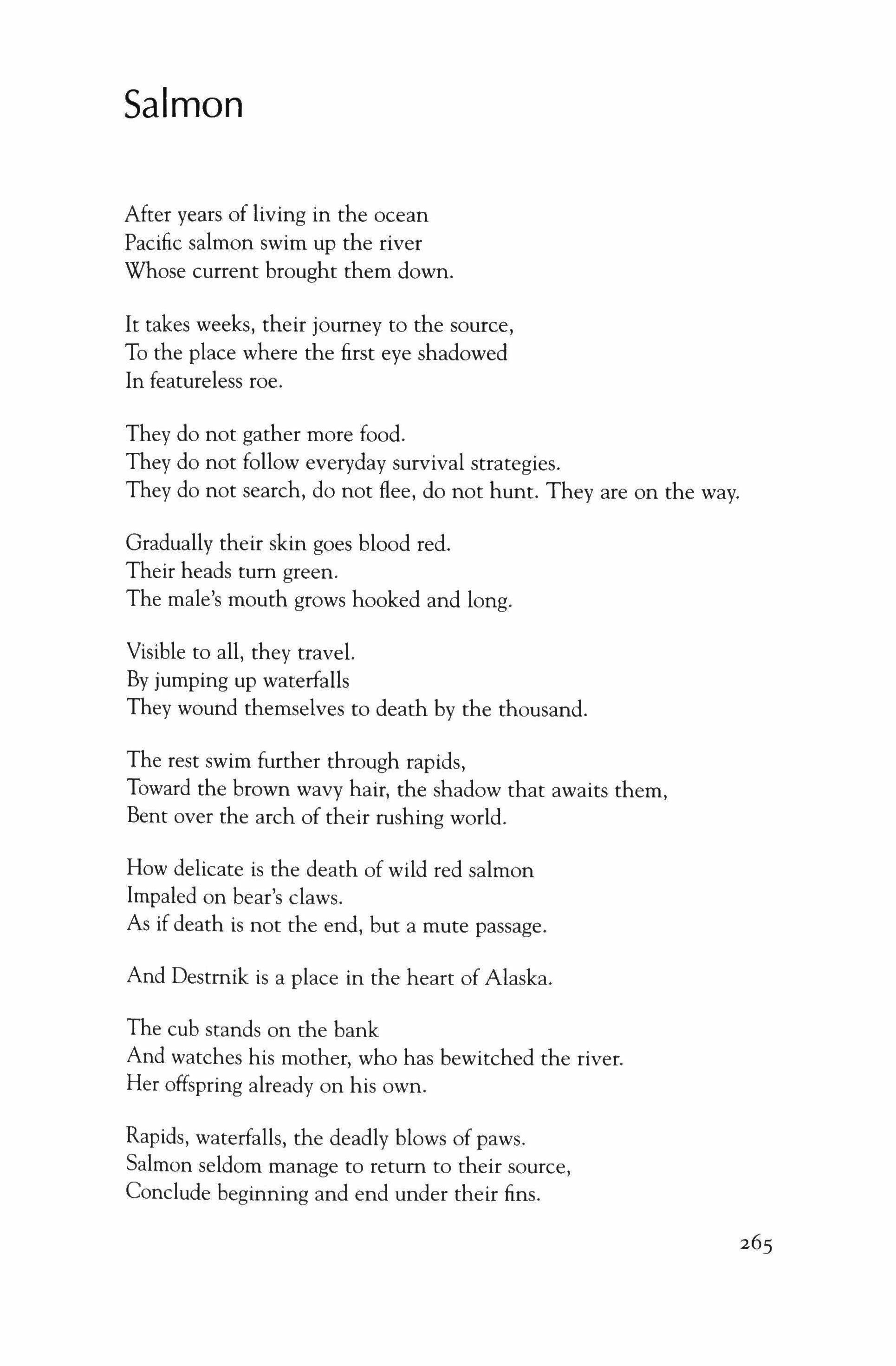
After years of living in the ocean
Pacific salmon swim up the river
Whose current brought them down.
It takes weeks, their journey to the source, To the place where the first eye shadowed In featureless roe.
They do not gather more food. They do not follow everyday survival strategies. They do not search, do not flee, do not hunt. They are on the way.
Gradually their skin goes blood red. Their heads tum green. The male's mouth grows hooked and long.
Visible to all, they travel. By jumping up waterfalls
They wound themselves to death by the thousand.
The rest swim further through rapids, Toward the brown wavy hair, the shadow that awaits them, Bent over the arch of their rushing world.
How delicate is the death of wild red salmon Impaled on bear's claws.
As if death is not the end, but a mute passage.
And Destrnik is a place in the heart of Alaska.
The cub stands on the bank
And watches his mother, who has bewitched the river. Her offspring already on his own.
Rapids, waterfalls, the deadly blows of paws. Salmon seldom manage to return to their source, Conclude beginning and end under their fins.

By spawning they die off slowly in icy waters. Their bloated hulls spread in pools. You walk against the current, which takes them. Which takes you.
From Knjiga Reci (The Book ofThings)
Jack B. Bedell
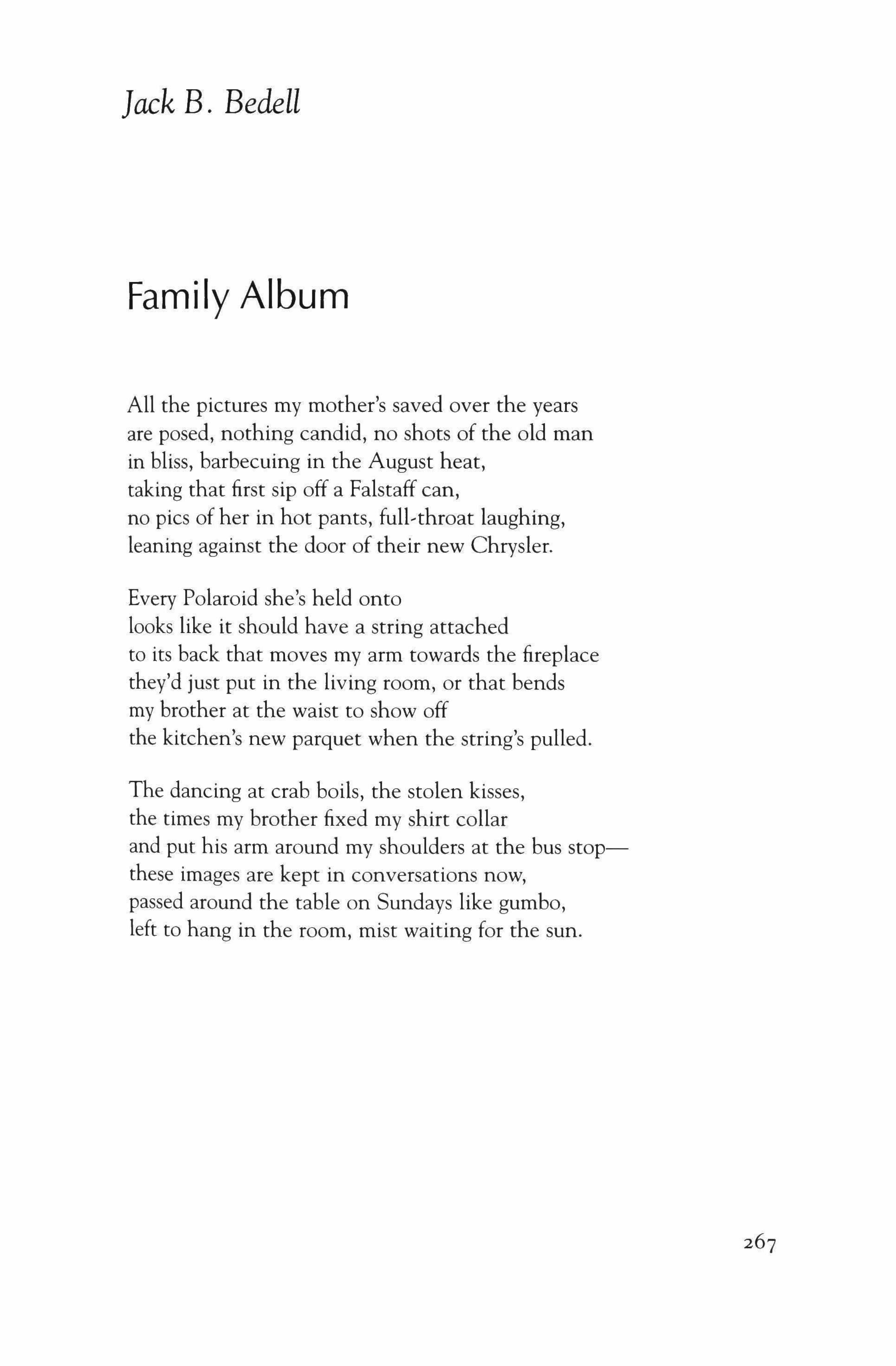
Family
Album
All the pictures my mother's saved over the years are posed, nothing candid, no shots of the old man in bliss, barbecuing in the August heat, taking that first sip off a Falstaff can, no pies of her in hot pants, full-throat laughing, leaning against the door of their new Chrysler.
Every Polaroid she's held onto looks like it should have a string attached to its back that moves my arm towards the fireplace they'd just put in the living room, or that bends my brother at the waist to show off the kitchen's new parquet when the string's pulled.
The dancing at crab boils, the stolen kisses, the times my brother fixed my shirt collar and put his arm around my shoulders at the bus stopthese images are kept in conversations now, passed around the table on Sundays like gumbo, left to hang in the room, mist waiting for the sun.
Shara McCallum
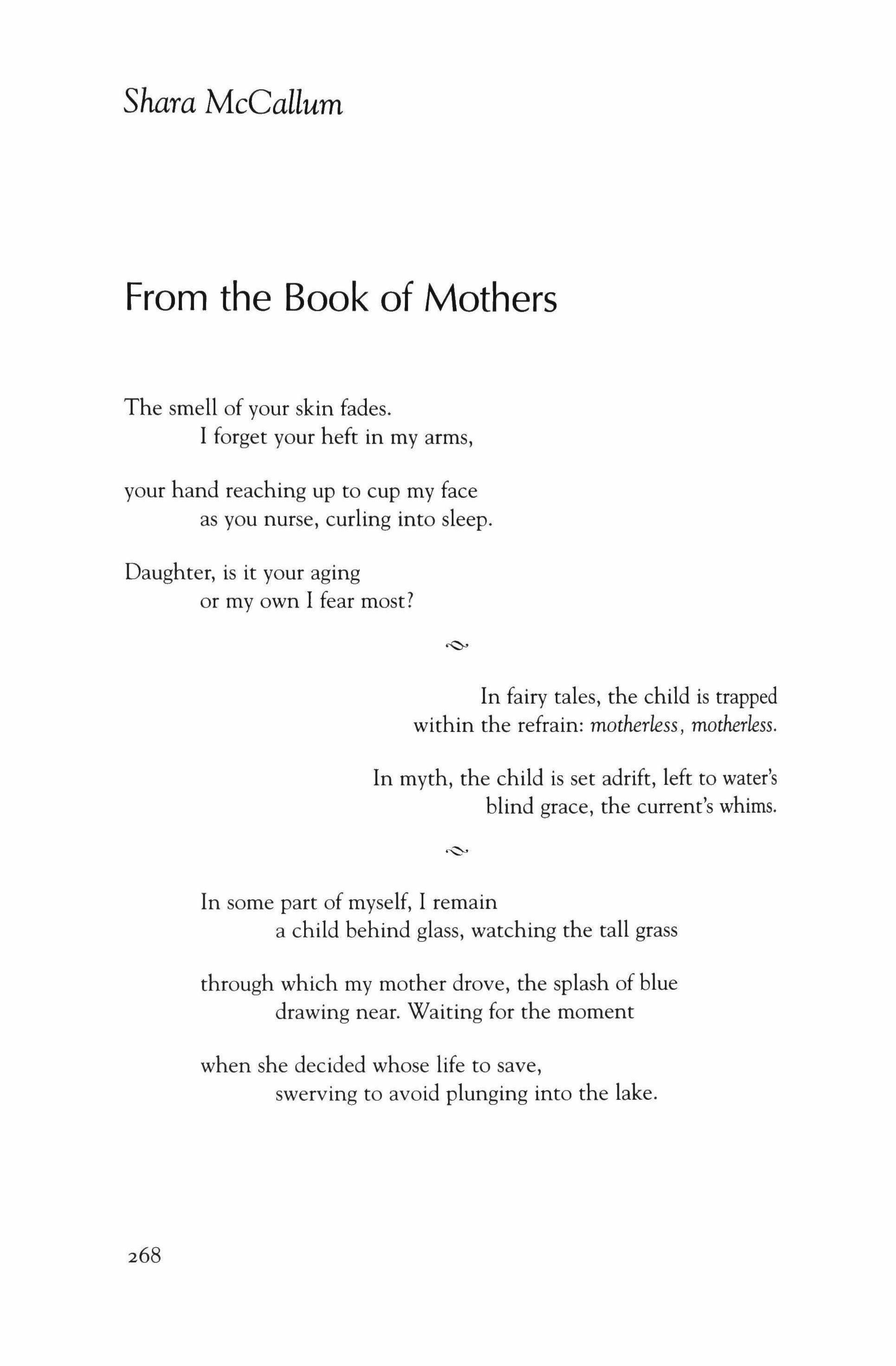
From the Book of Mothers
The smell of your skin fades. I forget your heft in my arms, your hand reaching up to cup my face as you nurse, curling into sleep.
Daughter, is it your aging or my own I fear most?
In fairy tales, the child is trapped within the refrain: motherless, motherless.
In myth, the child is set adrift, left to water's blind grace, the current's whims.
In some part of myself, I remain a child behind glass, watching the tall grass through which my mother drove, the splash of blue drawing near. Waiting for the moment when she decided whose life to save, swerving to avoid plunging into the lake.
If we are boats, how do we unmoor ourselves, how do we glide?
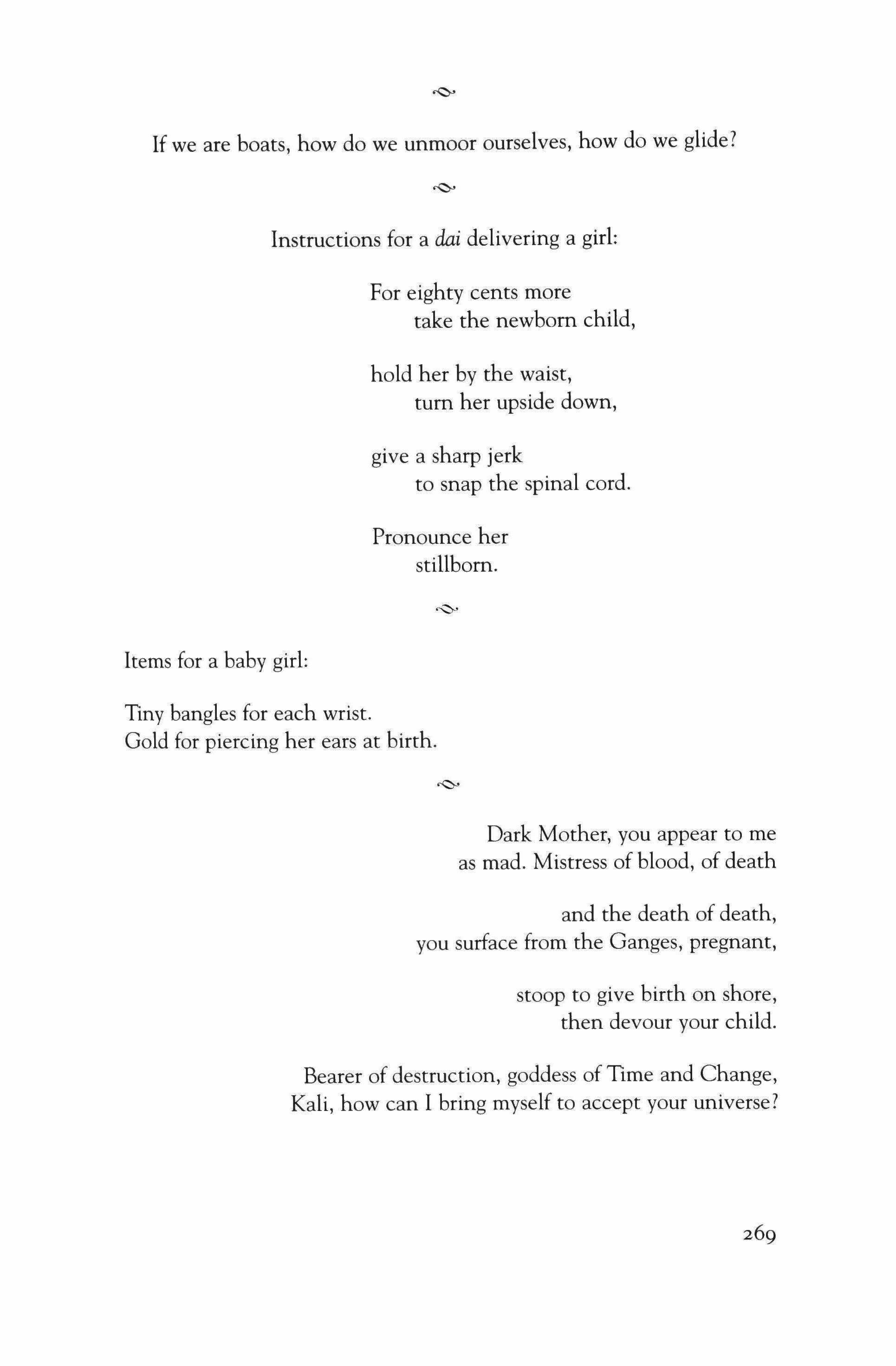
Instructions for a dai delivering a girl:
For eighty cents more take the newborn child, hold her by the waist, tum her upside down, give a sharp jerk to snap the spinal cord.
Pronounce her stillborn.
Items for a baby girl:
Tiny bangles for each wrist. Gold for piercing her ears at birth.
Dark Mother, you appear to me as mad. Mistress of blood, of death and the death of death, you surface from the Ganges, pregnant, stoop to give birth on shore, then devour your child.
Bearer of destruction, goddess of Time and Change, Kali, how can I bring myself to accept your universe?
Motherhood: rowing away from the shore.
They say the amniotic fluid is the ocean, the blood pumping to the mother's heart fills the child's ears
with first sounds, the infant knows her mother by smell before sight, the cord that binds them
dies once severed, they say.

mi navel string bury there
When my sister's first girl came into the world, she came with the cord wrapped around her neck.
She did not see her mother's face. She did not know she was loved before she was.
Mother, I am the dark in your eye.
From my grandmother's line eleven girls have descended, no boys in three generations. The women in my family repeat lives:
migrations, madness, exile, mothers and daughters estrangedconnected by a story that wants to go on without end-
Motherhood: the doll whose head refuses to return to its body.
I did not hear or could not listen. I barely knew you when you called.
Now when it is too late I want to tell you I am a mother
and think I understand something more of grief's depths. I am a mother
like but also not like you. My friendmay I call you this in death?-
my children's throats are what I lean toward to kiss.
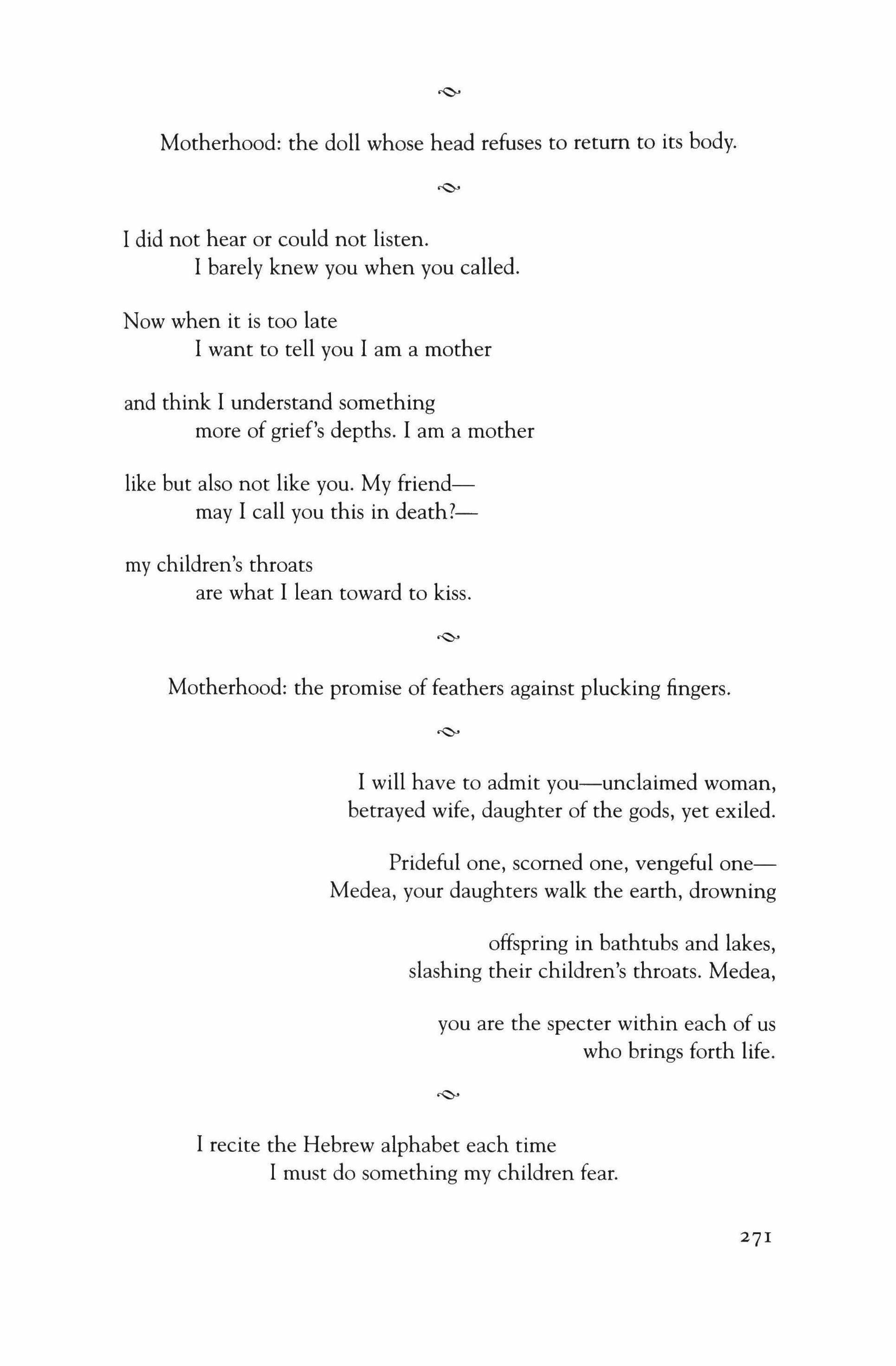
Motherhood: the promise of feathers against plucking fingers.
I will have to admit you-unclaimed woman, betrayed wife, daughter of the gods, yet exiled.
Prideful one, scorned one, vengeful oneMedea, your daughters walk the earth, drowning
offspring in bathtubs and lakes, slashing their children's throats. Medea, you are the specter within each of us who brings forth life.
I recite the Hebrew alphabet each time I must do something my children fear.
Alef Bet Gimel Dalet
Voice hushed, speech slow, I repeat these sounds till their breathing stills, Lamed Mem Nun
tears cease, their bodies given over to a language we do and do not know.
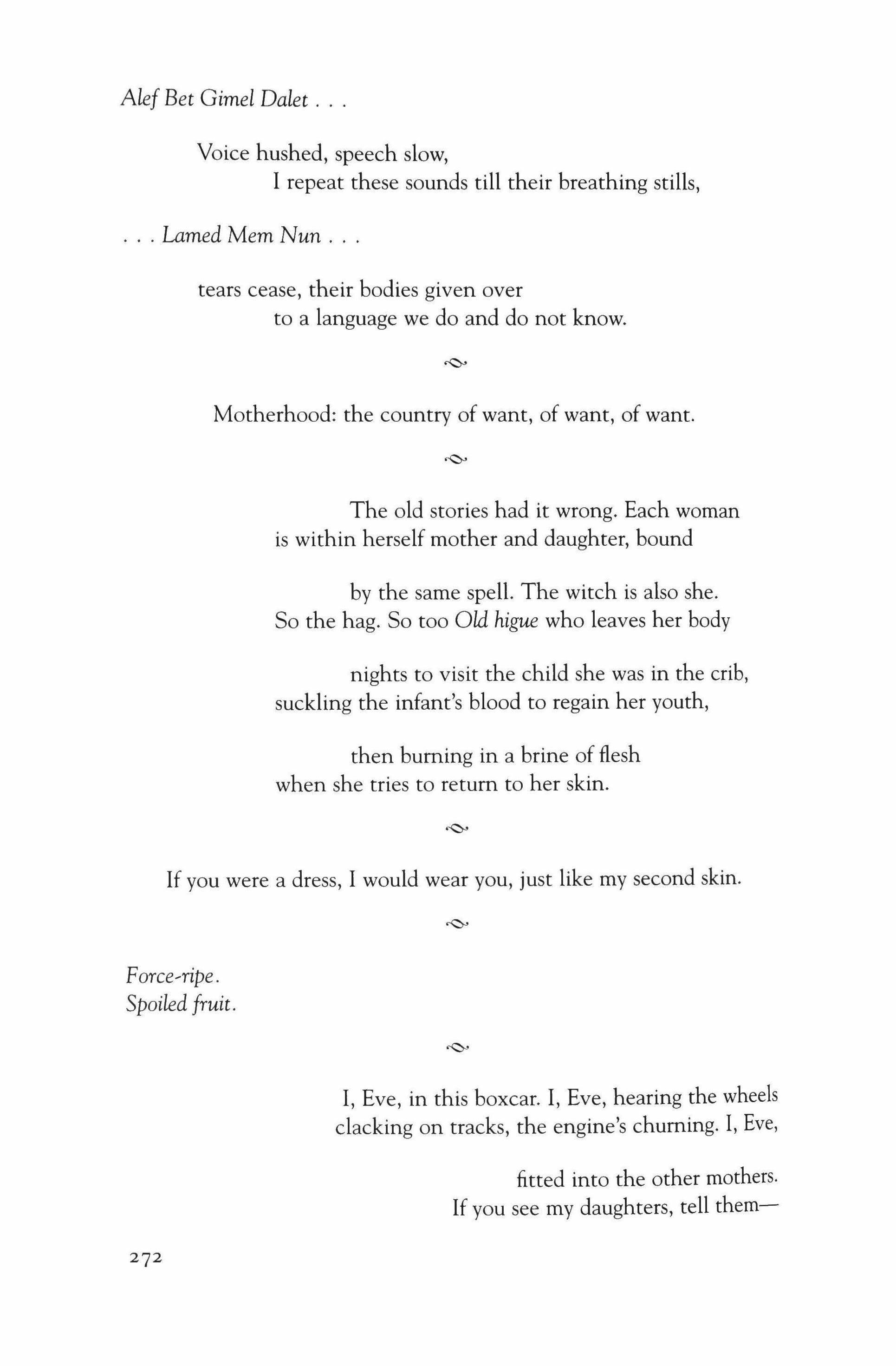
Motherhood: the country of want, of want, of want.
The old stories had it wrong. Each woman is within herself mother and daughter, bound by the same spell. The witch is also she. So the hag. So too Old higue who leaves her body
nights to visit the child she was in the crib, suckling the infant's blood to regain her youth,
then burning in a brine of flesh when she tries to return to her skin.
If you were a dress, I would wear you, just like my second skin.
Fotce-tipe. Spoiled fruit.
I, Eve, in this boxcar. I, Eve, hearing the wheels clacking on tracks, the engine's churning. I, Eve, fitted into the other mothers. If you see my daughters, tell them-
Final note to Demeter:
Bucket, bucket go a well. Bucket bottom drop out.
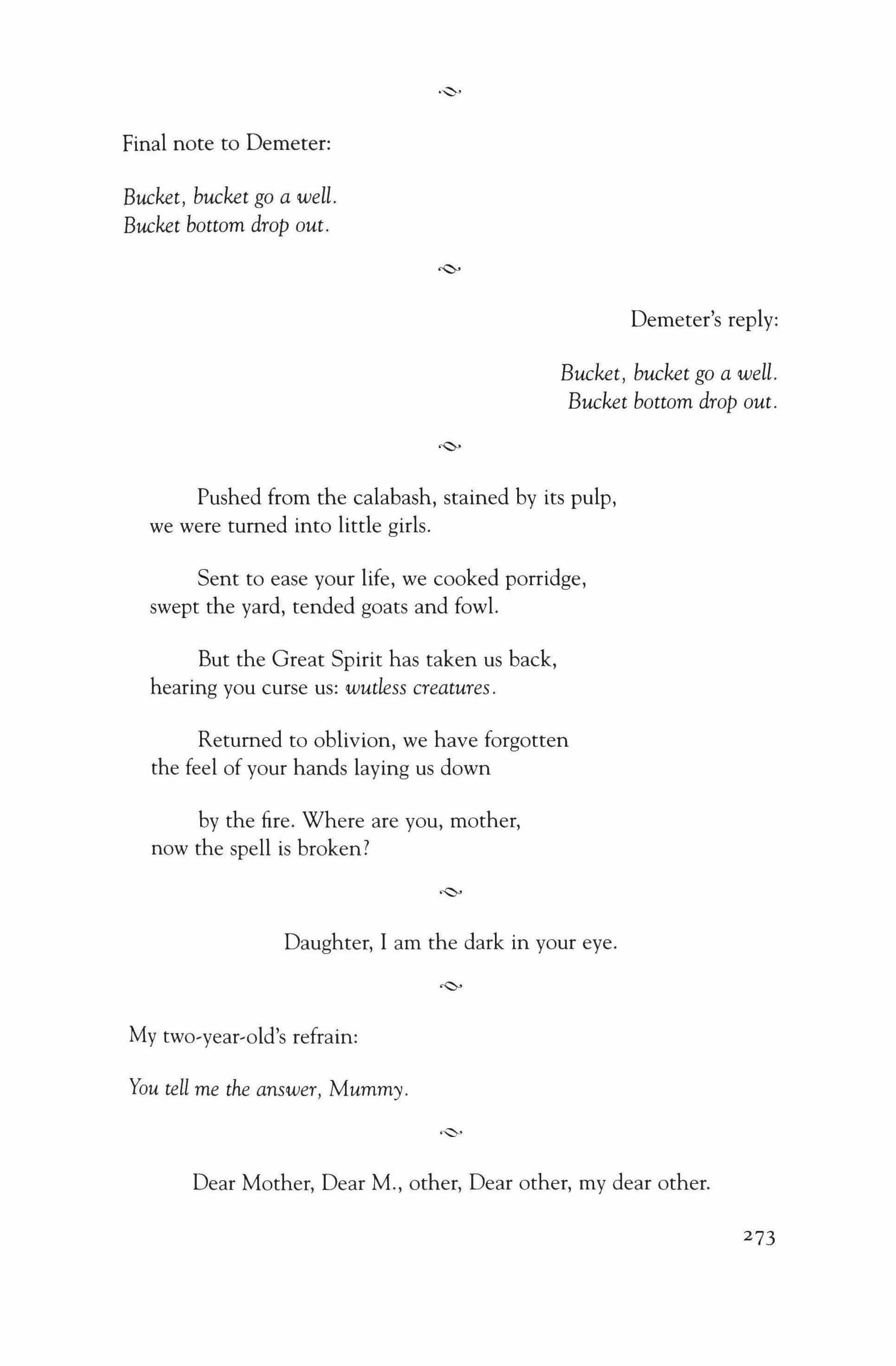
Demeter's reply:
Bucket, bucket go a well. Bucket bottom drop out.
Pushed from the calabash, stained by its pulp, we were turned into little girls.
Sent to ease your life, we cooked porridge, swept the yard, tended goats and fowl.
But the Great Spirit has taken us back, hearing you curse us: wutless creatures.
Returned to oblivion, we have forgotten the feel of your hands laying us down by the fire. Where are you, mother, now the spell is broken?
Daughter, I am the dark in your eye.
My two-year-old's refrain:
You tell me the answer, Mummy.
Dear Mother, Dear M., other, Dear other, my dear other.
-c-
273

But here you surface again, scales glittering in the sun. With a flick of your tail
I would follow you to any depths. I would weave a net
from my hair, catch fish for us to feast all day long.
I would stitch your skin with kisses, reel in the language marooned between us.
But you will never return to me. You, mermaid in question, of course have gone.
What is separation's geography?
The mother's body is the country
of our earliest memory, the soil from which we are formed.
Our lives are an arc of flight: away, toward, away. Instructions for lighting candles for Shabbat:
Take the match to each candle's wick. With cupped palms, pull the light toward you, encircling it with your arms.
Do this three times. Now cover your eyes to bring the flame inside.
274
Items for mothering:
Thimble, needle, thread.
Four pinches of salt.
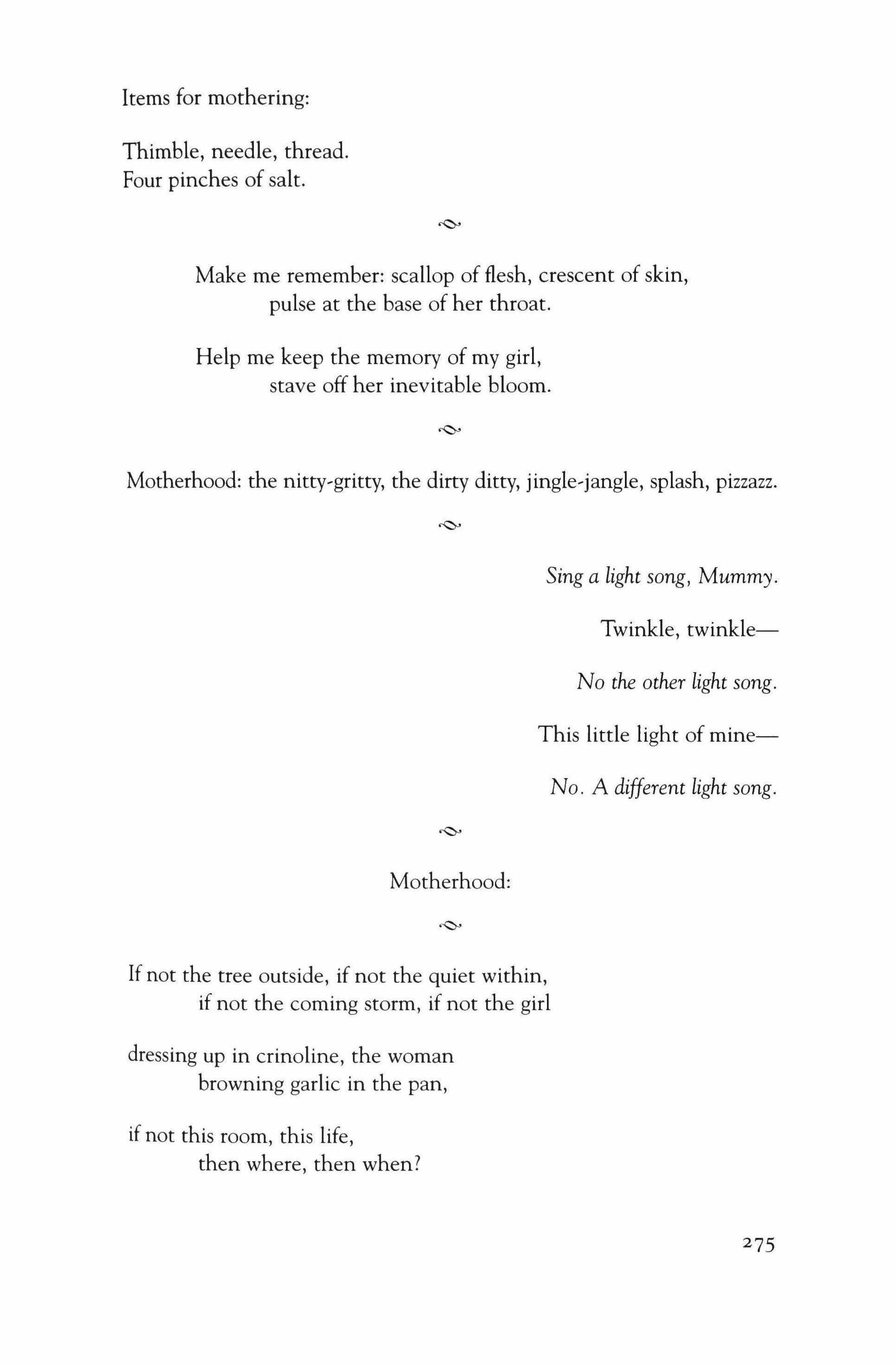
Make me remember: scallop of flesh, crescent of skin, pulse at the base of her throat.
Help me keep the memory of my girl, stave off her inevitable bloom.
Motherhood: the nitty,gritty, the dirty ditty, jingle-jangle, splash, pizzazz.
Sing a light song, Mummy.
Twinkle, twinkle-
No the other light song.
This little light of mine-
No. A different light song.
Motherhood:
If not the tree outside, if not the quiet within, if not the coming storm, if not the girl
dressing up in crinoline, the woman browning garlic in the pan, if not this room, this life, then where, then when?
275
Jennifer Grotz
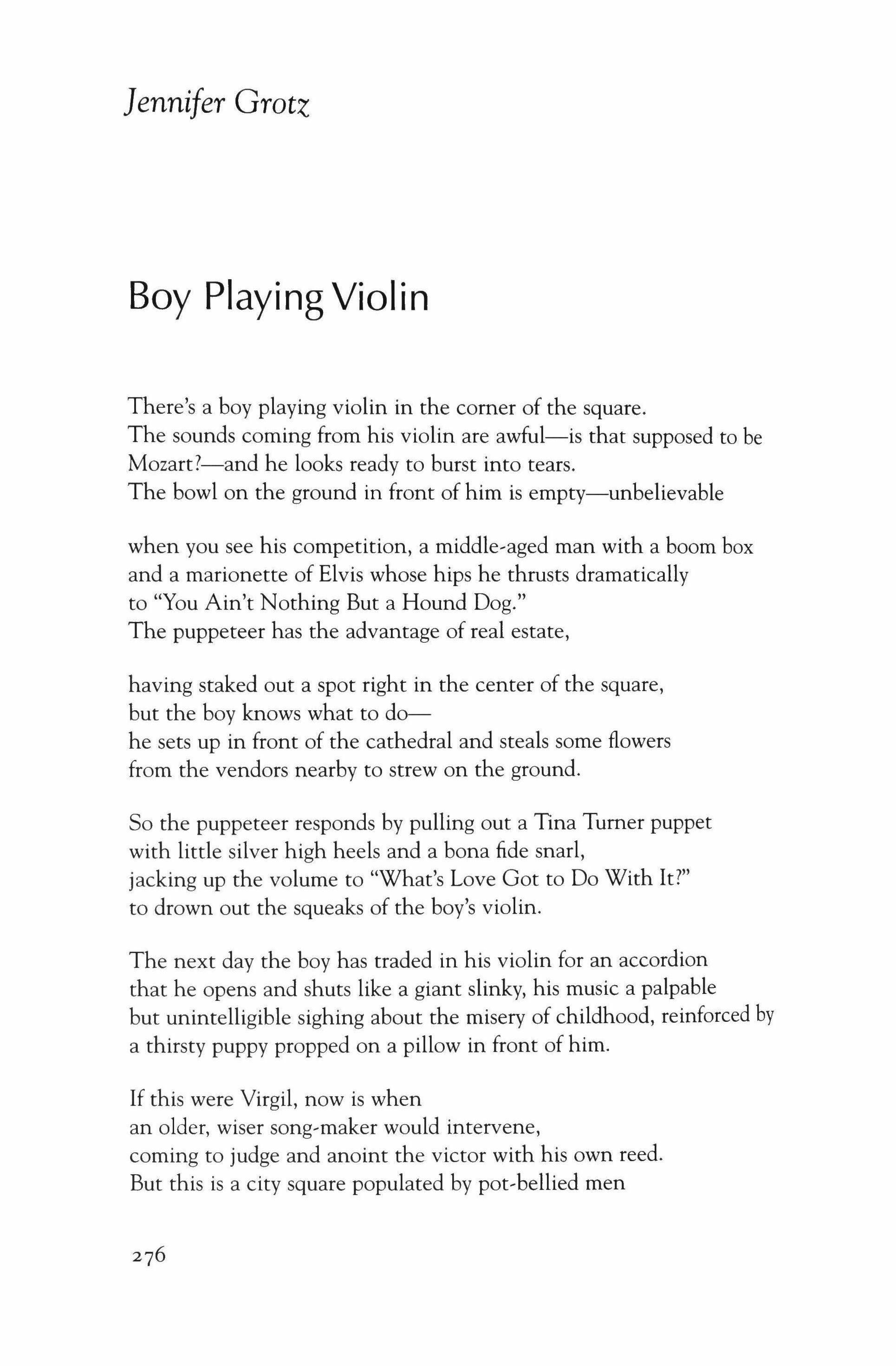
Boy Playing Violin
There's a boy playing violin in the comer of the square. The sounds coming from his violin are awful-is that supposed to be Mozart?-and he looks ready to burst into tears. The bowl on the ground in front of him is empty-unbelievable
when you see his competition, a middle-aged man with a boom box and a marionette of Elvis whose hips he thrusts dramatically to "You Ain't Nothing But a Hound Dog." The puppeteer has the advantage of real estate,
having staked out a spot right in the center of the square, but the boy knows what to dohe sets up in front of the cathedral and steals some flowers from the vendors nearby to strew on the ground.
So the puppeteer responds by pulling out a Tina Turner puppet with little silver high heels and a bona fide snarl, jacking up the volume to "What's Love Got to Do With It?" to drown out the squeaks of the boy's violin.
The next day the boy has traded in his violin for an accordion that he opens and shuts like a giant slinky, his music a palpable but unintelligible sighing about the misery of childhood, reinforced by a thirsty puppy propped on a pillow in front of him.
If this were Virgil, now is when an older, wiser song-maker would intervene, coming to judge and anoint the victor with his own reed. But this is a city square populated by pot-bellied men
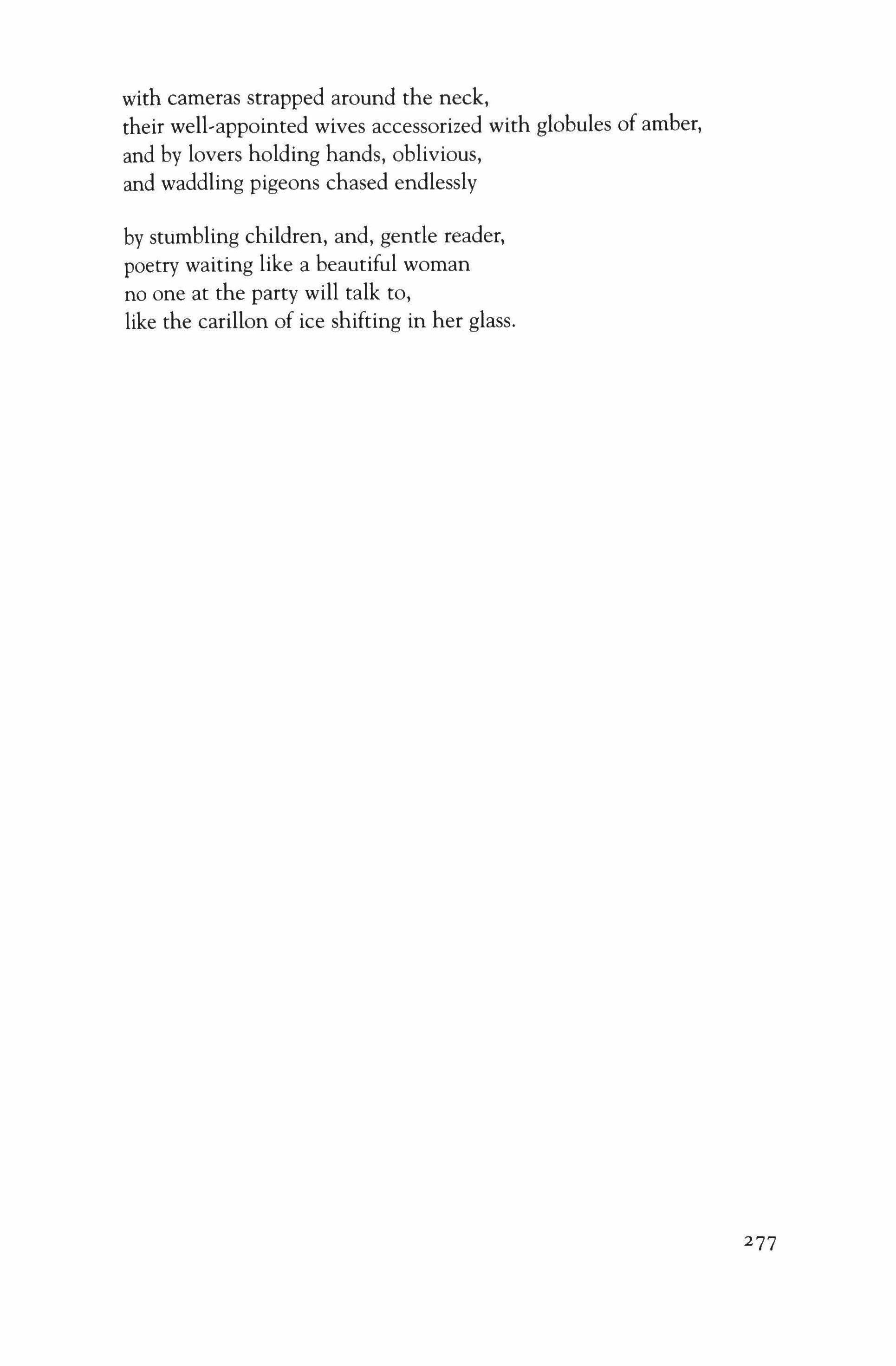
with cameras strapped around the neck, their well-appointed wives accessorized with globules of amber, and by lovers holding hands, oblivious, and waddling pigeons chased endlessly by stumbling children, and, gentle reader, poetry waiting like a beautiful woman no one at the party will talk to, like the carillon of ice shifting in her glass.
Sunrise in Cassis
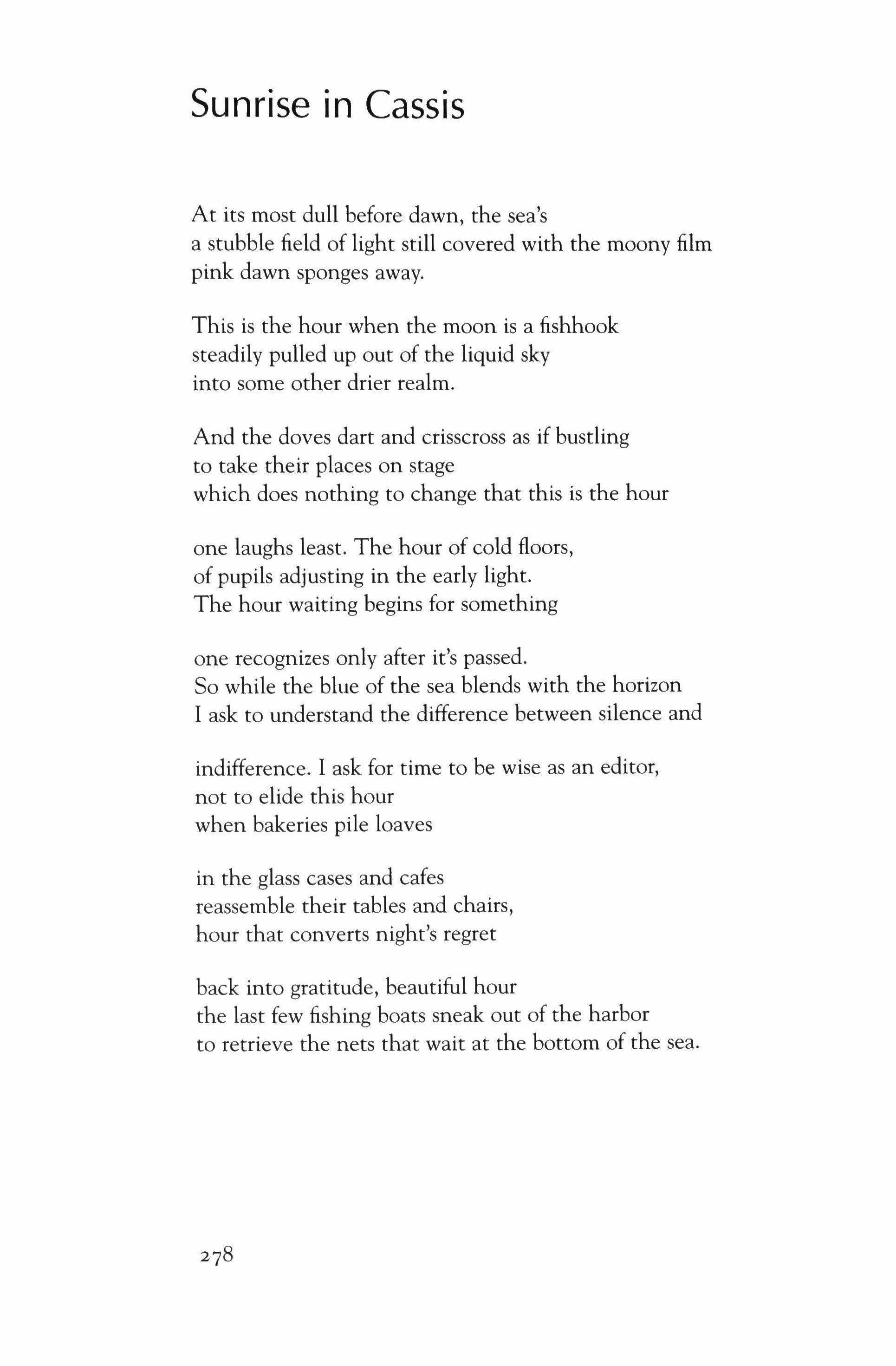
At its most dull before dawn, the sea's a stubble field of light still covered with the moony film pink dawn sponges away.
This is the hour when the moon is a fishhook steadily pulled up out of the liquid sky into some other drier realm.
And the doves dart and crisscross as if bustling to take their places on stage which does nothing to change that this is the hour
one laughs least. The hour of cold floors, of pupils adjusting in the early light. The hour waiting begins for something one recognizes only after it's passed. So while the blue of the sea blends with the horizon I ask to understand the difference between silence and
indifference. I ask for time to be wise as an editor, not to elide this hour when bakeries pile loaves
in the glass cases and cafes reassemble their tables and chairs, hour that converts night's regret back into gratitude, beautiful hour the last few fishing boats sneak out of the harbor to retrieve the nets that wait at the bottom of the sea.
Pharos
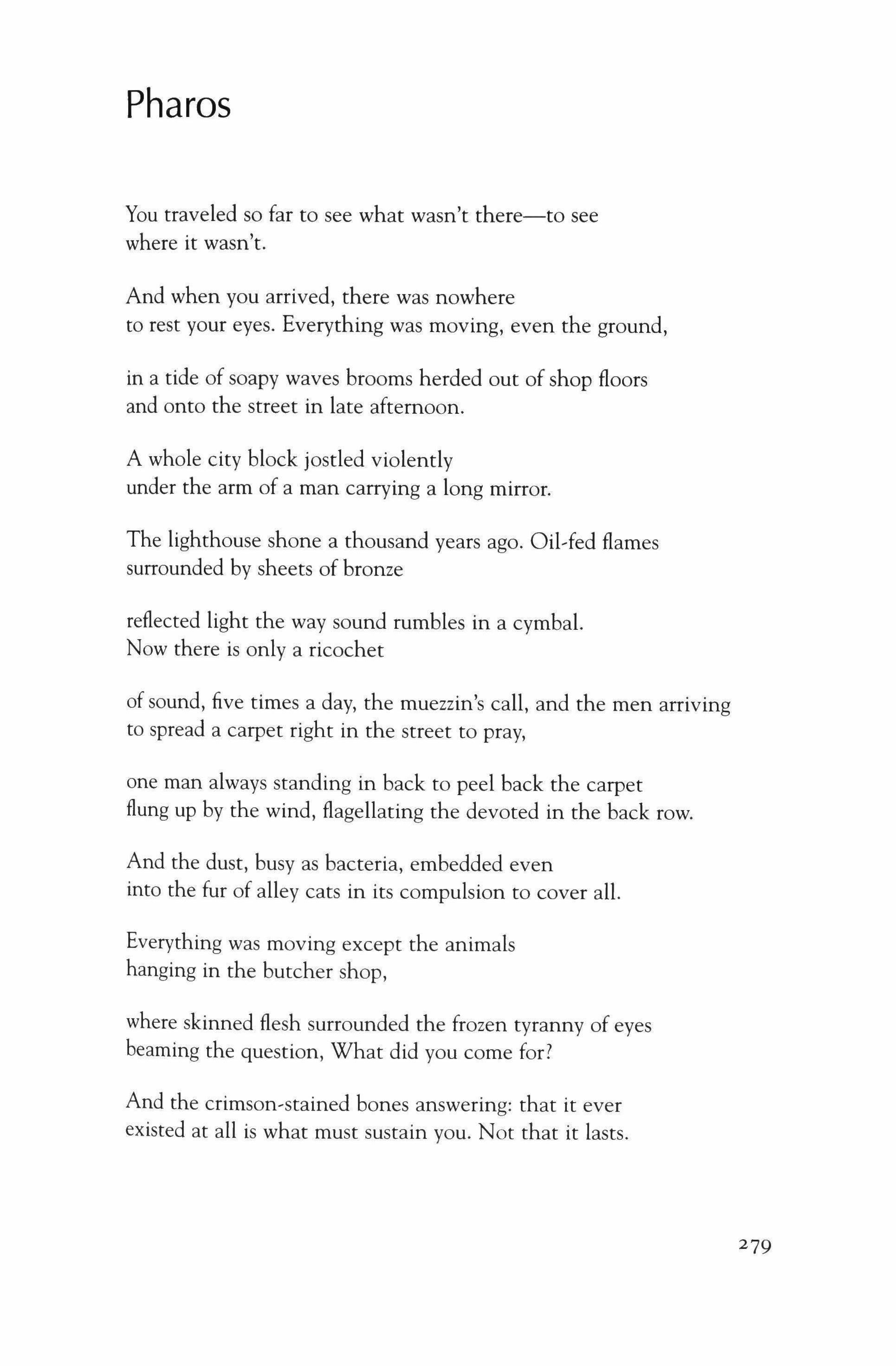
You traveled so far to see what wasn't there-to see where it wasn't.
And when you arrived, there was nowhere to rest your eyes. Everything was moving, even the ground, in a tide of soapy waves brooms herded out of shop floors and onto the street in late afternoon.
A whole city block jostled violently under the arm of a man carrying a long mirror.
The lighthouse shone a thousand years ago. Oil-fed flames surrounded by sheets of bronze reflected light the way sound rumbles in a cymbal. Now there is only a ricochet
of sound, five times a day, the muezzin's call, and the men arriving to spread a carpet right in the street to pray,
one man always standing in back to peel back the carpet flung up by the wind, flagellating the devoted in the back row.
And the dust, busy as bacteria, embedded even into the fur of alley cats in its compulsion to cover all.
Everything was moving except the animals hanging in the butcher shop, where skinned flesh surrounded the frozen tyranny of eyes beaming the question, What did you come for?
And the crimson-stained bones answering: that it ever existed at all is what must sustain you. Not that it lasts.
279
Christina Pugh
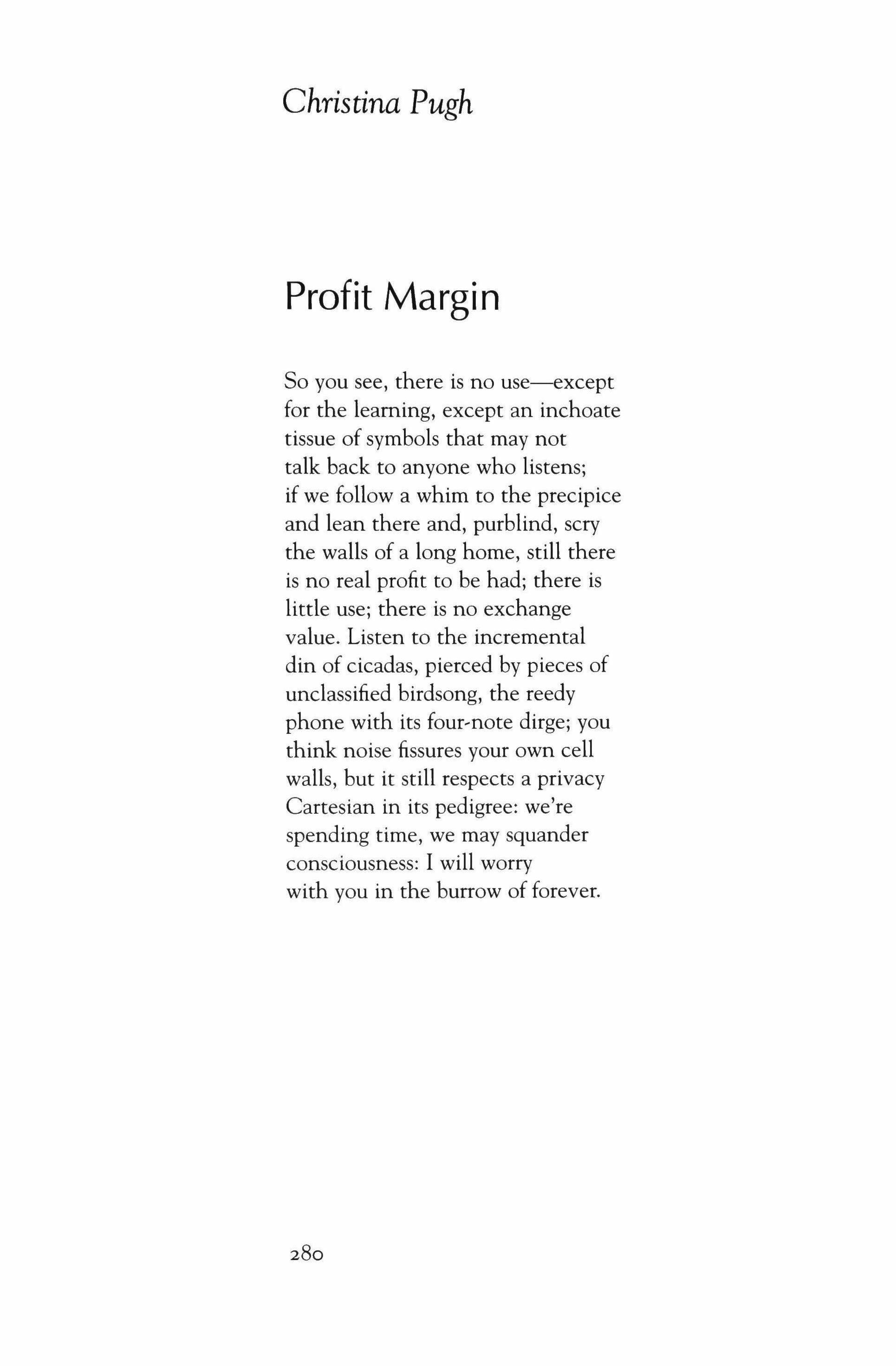
Profit Margi n
So you see, there is no use-except for the learning, except an inchoate tissue of symbols that may not talk back to anyone who listens; if we follow a whim to the precipice and lean there and, purblind, scry the walls of a long home, still there is no real profit to be had; there is little use; there is no exchange value. Listen to the incremental din of cicadas, pierced by pieces of unclassified birdsong, the reedy phone with its four-note dirge; you think noise fissures your own cell walls, but it still respects a privacy Cartesian in its pedigree: we're spending time, we may squander consciousness: I will worry with you in the burrow of forever.
On Slenderness
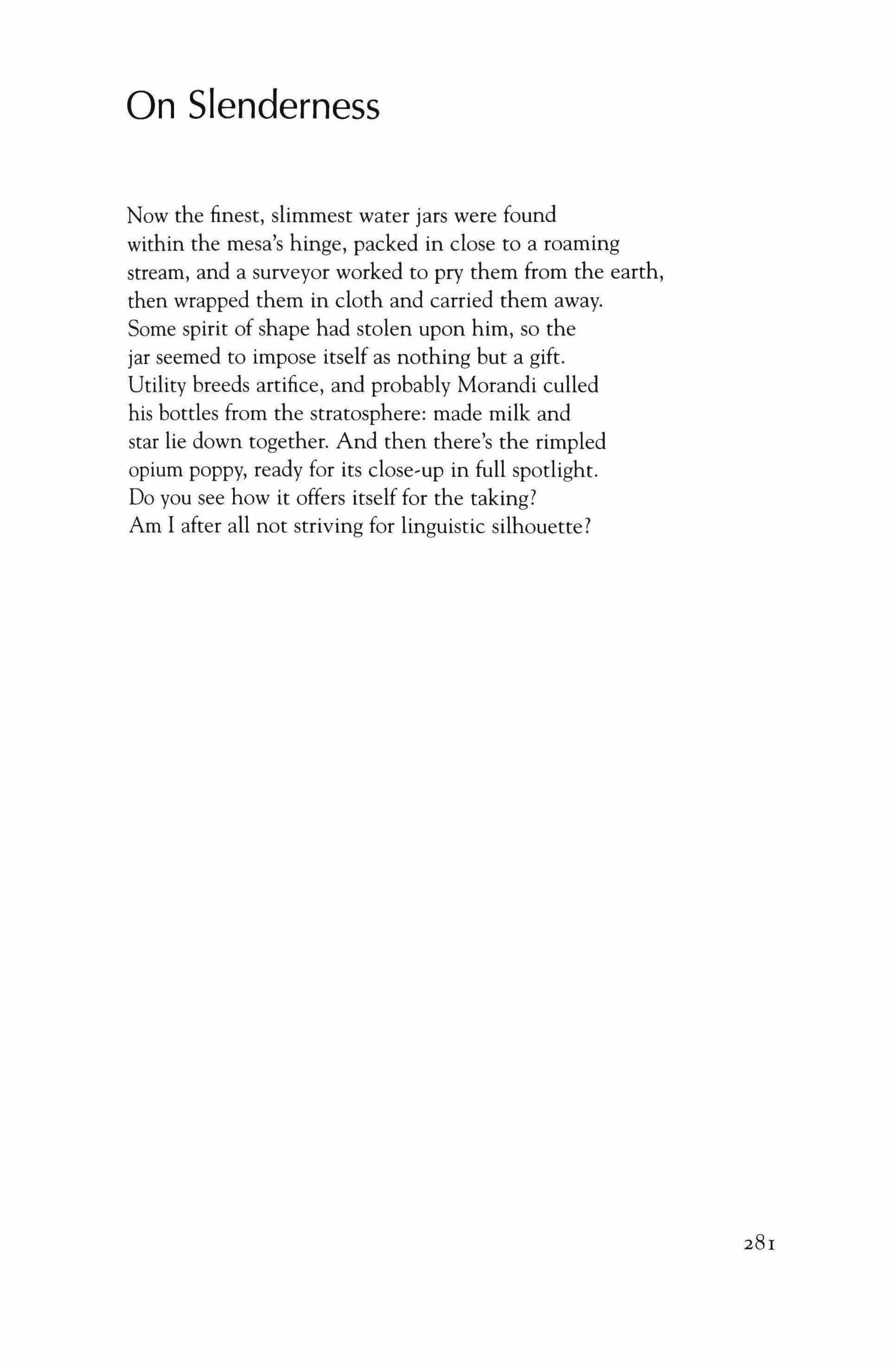
Now the finest, slimmest water jars were found within the mesa's hinge, packed in close to a roaming stream, and a surveyor worked to pry them from the earth, then wrapped them in cloth and carried them away. Some spirit of shape had stolen upon him, so the jar seemed to impose itself as nothing but a gift. Utility breeds artifice, and probably Morandi culled his bottles from the stratosphere: made milk and star lie down together. And then there's the rimpled opium poppy, ready for its close'up in full spotlight. Do you see how it offers itself for the taking?
Am I after all not striving for linguistic silhouette?
Filmic

When a filmmaker polices hue, bars blue or gold or yellow from a scene, he may be appealing to those stillborn seeds subsisting rich within our vision, so anamnesis kindles like a match beneath a percept-or the two-tone stripe of my first LA memories: a baby's rug was arson-black, garage door pink as Caucasian flesh in sunburn. Memory will saturate the colors we see: it slashes and shrines; it taillights, it streamlines. It's already left pied perception in the dust. In its wake, the leaves are rustling and rustling, if analogue; but digital leaves clink like sirens, like spoons.
Susan Rich
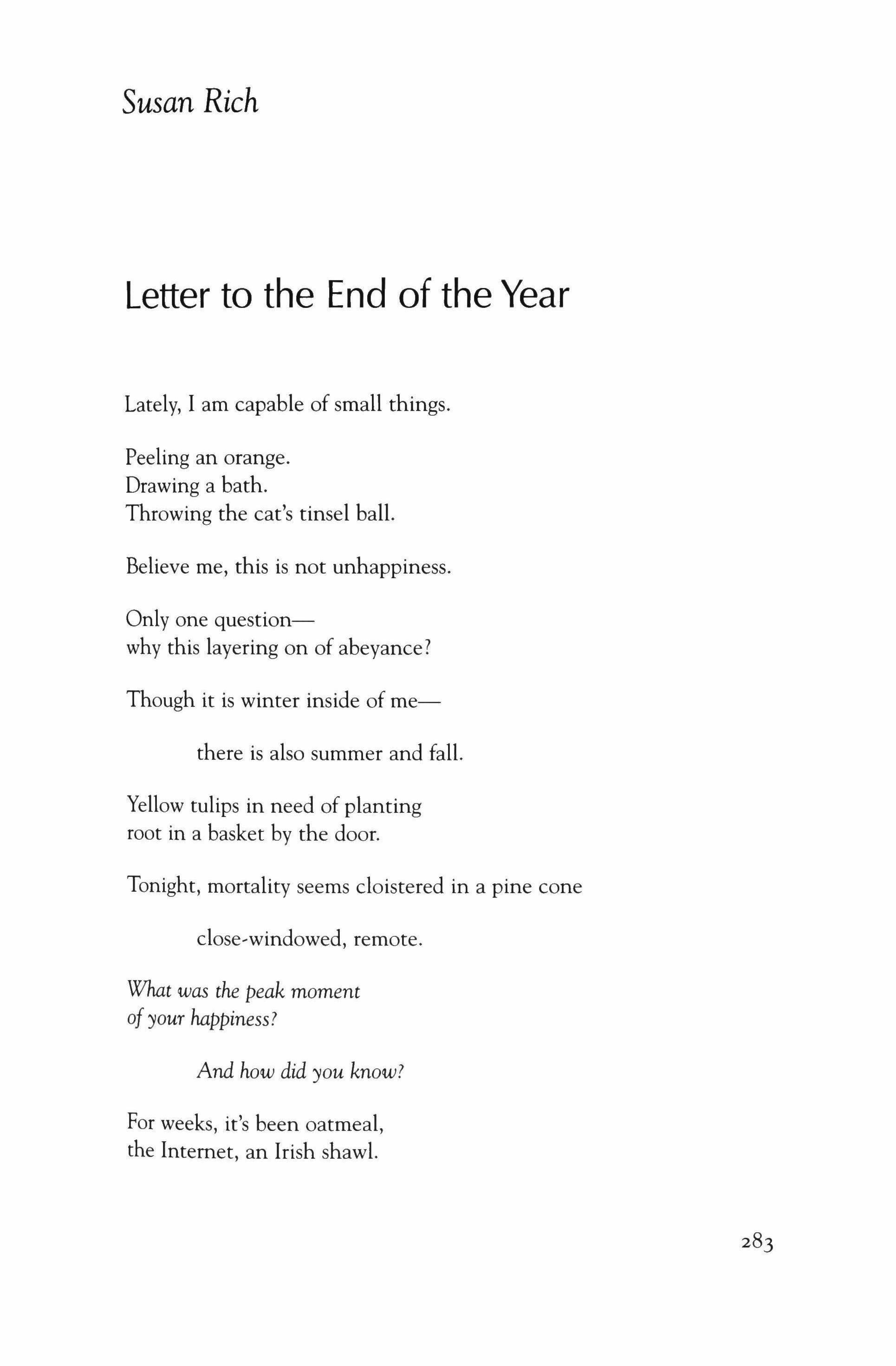
Letter to the End of the Year
Lately, I am capable of small things.
Peeling an orange.
Drawing a bath.
Throwing the cat's tinsel ball.
Believe me, this is not unhappiness.
Only one questionwhy this layering on of abeyance?
Though it is winter inside of methere is also summer and fall.
Yellow tulips in need of planting root in a basket by the door.
Tonight, mortality seems cloistered in a pine cone close-windowed, remote.
What was the peak moment of your happiness?
And how did you know?
For weeks, it's been oatmeal, the Internet, an Irish shawl.

I realize, I am growing older and stranger.
Please, don't misunderstand.
I am still impatient still waiting for symbiont and swoon the litter of blue-gold-ea one-time constellation: Now, before you go.
Art Lessons
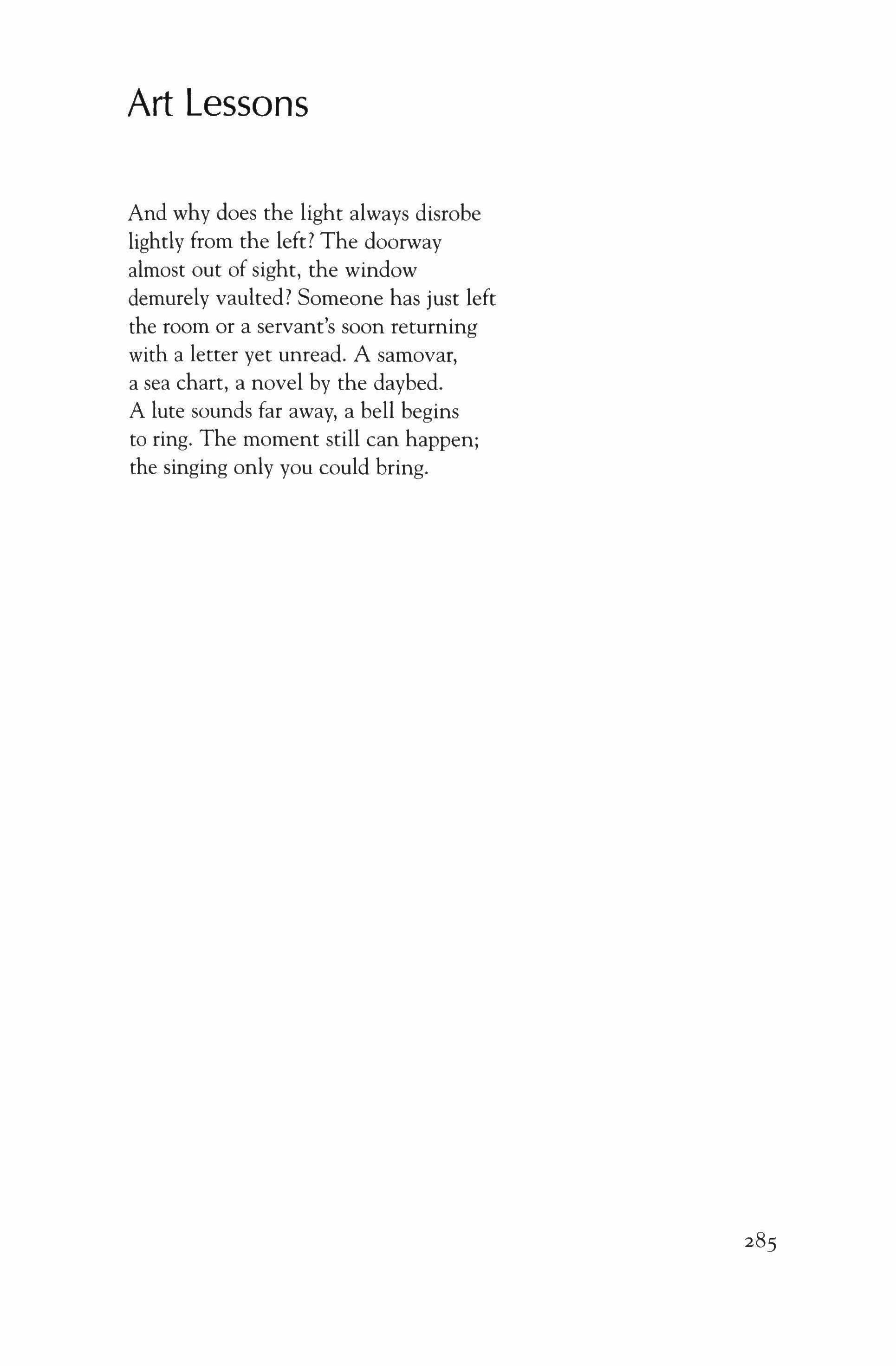
And why does the light always disrobe lightly from the left? The doorway almost out of sight, the window demurely vaulted? Someone has just left the room or a servant's soon returning with a letter yet unread. A samovar, a sea chart, a novel by the daybed. A lute sounds far away, a bell begins to ring. The moment still can happen; the singing only you could bring.
Donna Seaman
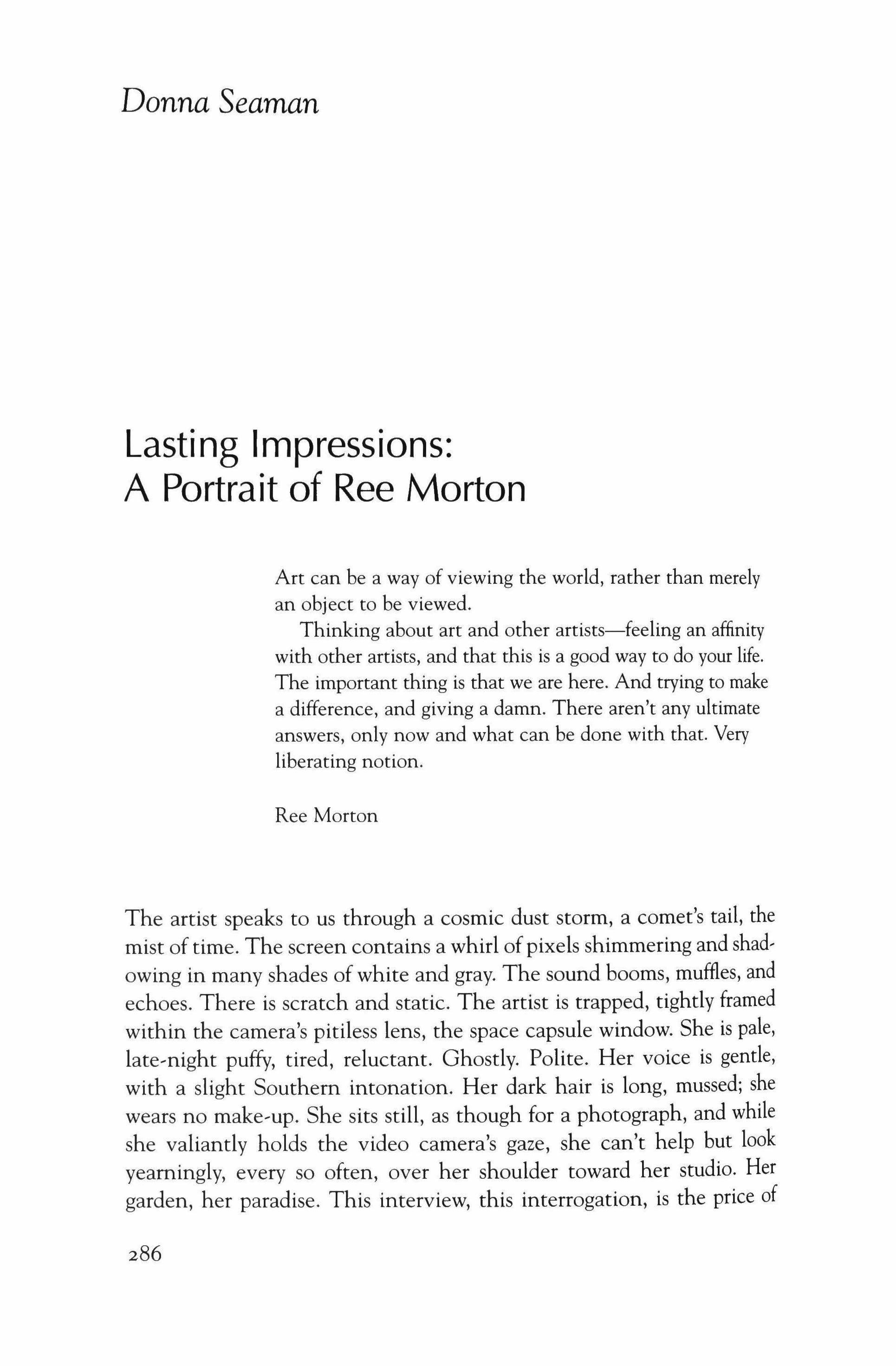
Lasting Impressions:
A Portrait of Ree Morton
Art can be a way of viewing the world, rather than merely an object to be viewed.
Thinking about art and other artists-feeling an affinity with other artists, and that this is a good way to do your life. The important thing is that we are here. And trying to make a difference, and giving a damn. There aren't any ultimate answers, only now and what can be done with that. Very liberating notion.
Ree Morton
The artist speaks to us through a cosmic dust storm, a comet's tail, the mist of time. The screen contains a whirl ofpixels shimmering and shadowing in many shades of white and gray. The sound booms, muffles, and echoes. There is scratch and static. The artist is trapped, tightly framed within the camera's pitiless lens, the space capsule window. She is pale, late-night puffy, tired, reluctant. Ghostly. Polite. Her voice is gentle, with a slight Southern intonation. Her dark hair is long, mussed; she wears no make-up. She sits still, as though for a photograph, and while she valiantly holds the video camera's gaze, she can't help but look yearningly, every so often, over her shoulder toward her studio. Her garden, her paradise. This interview, this interrogation, is the price of
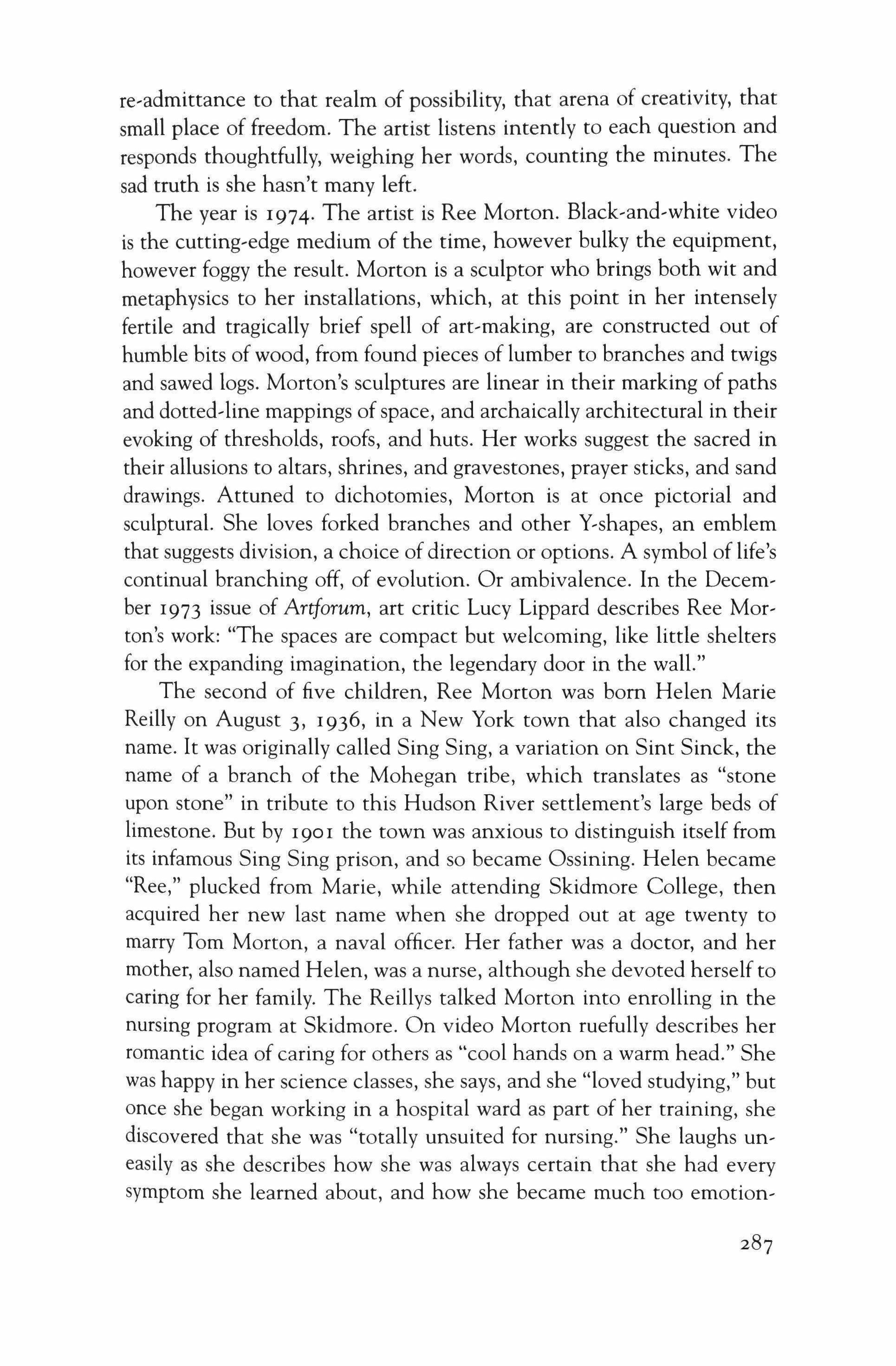
re-admittance to that realm of possibility, that arena of creativity, that small place of freedom. The artist listens intently to each question and responds thoughtfully, weighing her words, counting the minutes. The sad truth is she hasn't many left.
The year is 1974. The artist is Ree Morton. Black-and-white video is the cutting,edge medium of the time, however bulky the equipment, however foggy the result. Morton is a sculptor who brings both wit and metaphysics to her installations, which, at this point in her intensely fertile and tragically brief spell of art'making, are constructed out of humble bits of wood, from found pieces of lumber to branches and twigs and sawed logs. Morton's sculptures are linear in their marking of paths and dotted,line mappings of space, and archaically architectural in their evoking of thresholds, roofs, and huts. Her works suggest the sacred in their allusions to altars, shrines, and gravestones, prayer sticks, and sand drawings. Attuned to dichotomies, Morton is at once pictorial and sculptural. She loves forked branches and other Yshapes, an emblem that suggests division, a choice of direction or options. A symbol of life's continual branching off, of evolution. Or ambivalence. In the Decem, her 1973 issue of Artforum, art critic Lucy Lippard describes Ree Morton's work: "The spaces are compact but welcoming, like little shelters for the expanding imagination, the legendary door in the wall."
The second of five children, Ree Morton was born Helen Marie Reilly on August 3, 1936, in a New York town that also changed its name. It was originally called Sing Sing, a variation on Sint Sinck, the name of a branch of the Mohegan tribe, which translates as "stone upon stone" in tribute to this Hudson River settlement's large beds of limestone. But by 1901 the town was anxious to distinguish itself from its infamous Sing Sing prison, and so became Ossining. Helen became "Ree," plucked from Marie, while attending Skidmore College, then acquired her new last name when she dropped out at age twenty to marry Tom Morton, a naval officer. Her father was a doctor, and her mother, also named Helen, was a nurse, although she devoted herself to caring for her family. The Reillys talked Morton into enrolling in the nursing program at Skidmore. On video Morton ruefully describes her romantic idea of caring for others as "cool hands on a warm head." She was happy in her science classes, she says, and she "loved studying," but once she began working in a hospital ward as part of her training, she discovered that she was "totally unsuited for nursing." She laughs uneasily as she describes how she was always certain that she had every symptom she learned about, and how she became much too emotion,
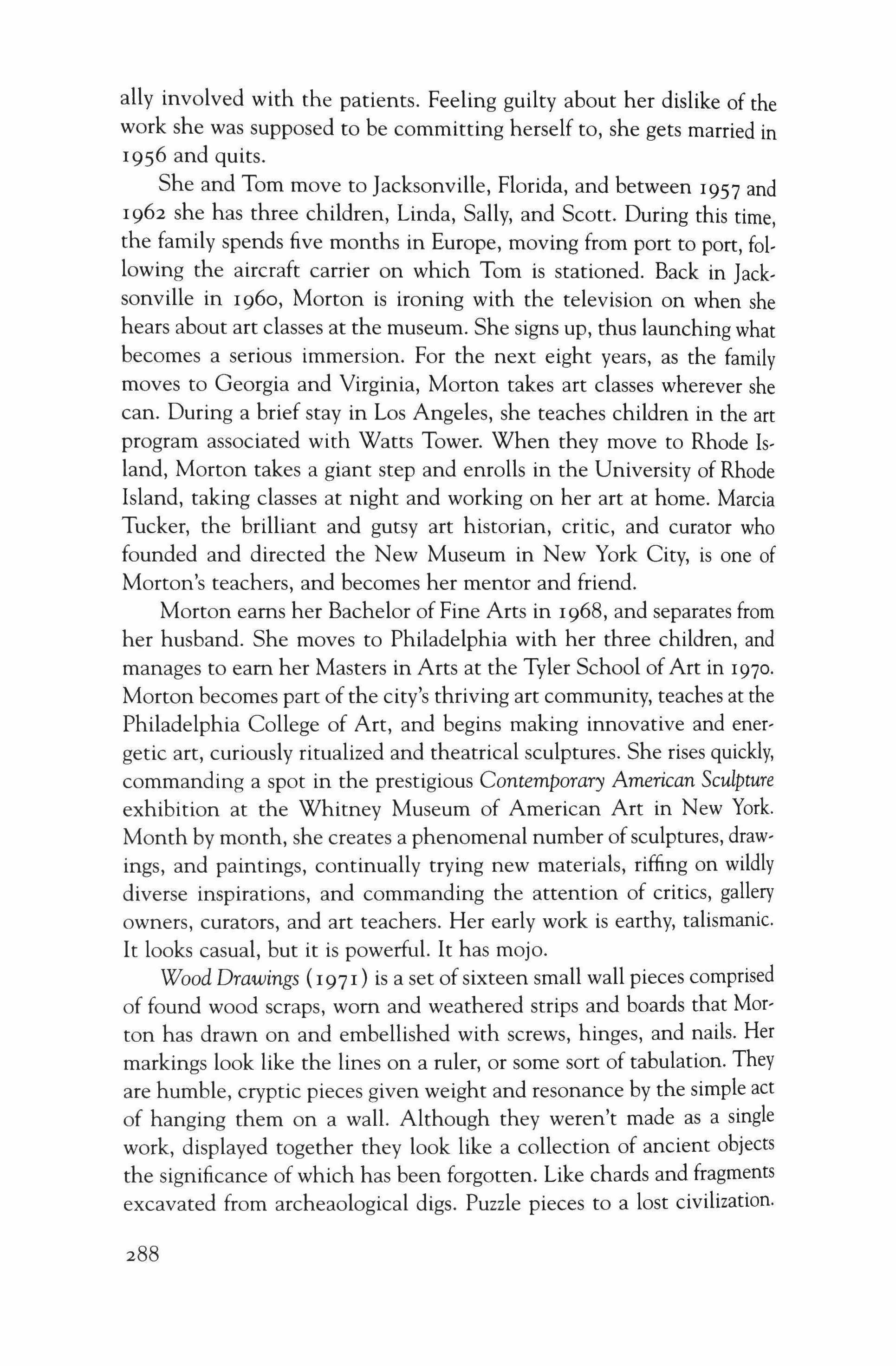
ally involved with the patients. Feeling guilty about her dislike of the work she was supposed to be committing herself to, she gets married in 1956 and quits.
She and Tom move to Jacksonville, Florida, and between 1957 and 1962 she has three children, Linda, Sally, and Scott. During this time, the family spends five months in Europe, moving from port to port, following the aircraft carrier on which Tom is stationed. Back in Jacksonville in 1960, Morton is ironing with the television on when she hears about art classes at the museum. She signs up, thus launching what becomes a serious immersion. For the next eight years, as the family moves to Georgia and Virginia, Morton takes art classes wherever she can. During a brief stay in Los Angeles, she teaches children in the art program associated with Watts Tower. When they move to Rhode Island, Morton takes a giant step and enrolls in the University of Rhode Island, taking classes at night and working on her art at home. Marcia Tucker, the brilliant and gutsy art historian, critic, and curator who founded and directed the New Museum in New York City, is one of Morton's teachers, and becomes her mentor and friend.
Morton earns her Bachelor of Fine Arts in 1968, and separates from her husband. She moves to Philadelphia with her three children, and manages to earn her Masters in Arts at the Tyler School ofArt in 1970. Morton becomes part of the city's thriving art community, teaches at the Philadelphia College of Art, and begins making innovative and energetic art, curiously ritualized and theatrical sculptures. She rises quickly, commanding a spot in the prestigious Contemporary American Sculpture exhibition at the Whitney Museum of American Art in New York. Month by month, she creates a phenomenal number ofsculptures, drawings, and paintings, continually trying new materials, riffing on wildly diverse inspirations, and commanding the attention of critics, gallery owners, curators, and art teachers. Her early work is earthy, talismanic. It looks casual, but it is powerful. It has mojo.
Wood Drawings (1971) is a set of sixteen small wall pieces comprised of found wood scraps, worn and weathered strips and boards that Morton has drawn on and embellished with screws, hinges, and nails. Her markings look like the lines on a ruler, or some sort of tabulation. They are humble, cryptic pieces given weight and resonance by the simple act of hanging them on a wall. Although they weren't made as a single work, displayed together they look like a collection of ancient objects the significance of which has been forgotten. Like chards and fragments excavated from archeaological digs. Puzzle pieces to a lost civilization.
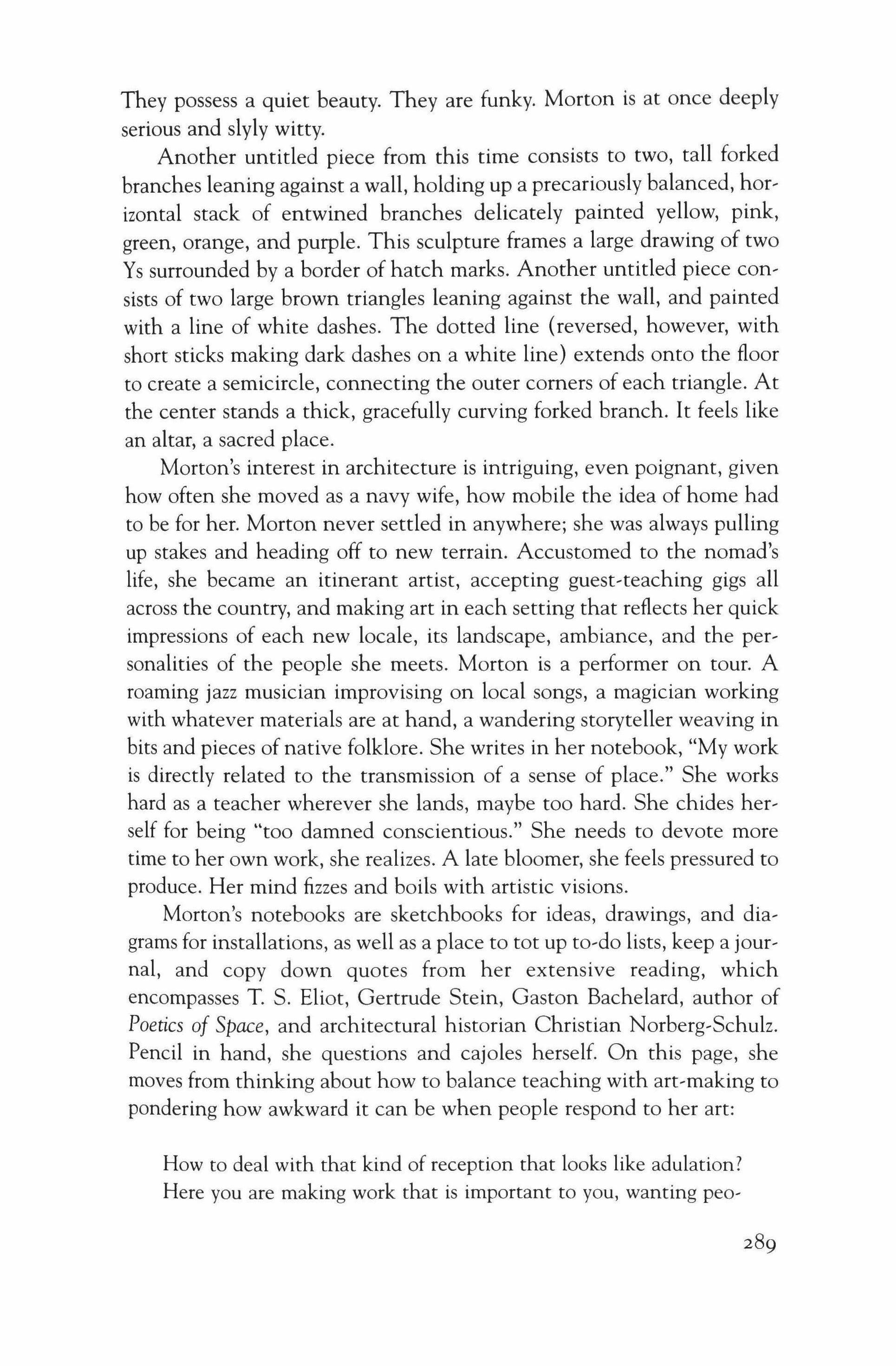
They possess a quiet beauty. They are funky. Morton is at once deeply serious and slyly witty.
Another untitled piece from this time consists to two, tall forked branches leaning against a wall, holding up a precariously balanced, horizontal stack of entwined branches delicately painted yellow, pink, green, orange, and purple. This sculpture frames a large drawing of two Ys surrounded by a border of hatch marks. Another untitled piece con' sists of two large brown triangles leaning against the wall, and painted with a line of white dashes. The dotted line {reversed, however, with short sticks making dark dashes on a white line} extends onto the floor to create a semicircle, connecting the outer comers of each triangle. At the center stands a thick, gracefully curving forked branch. It feels like an altar, a sacred place.
Morton's interest in architecture is intriguing, even poignant, given how often she moved as a navy wife, how mobile the idea of home had to be for her. Morton never settled in anywhere; she was always pulling up stakes and heading off to new terrain. Accustomed to the nomad's life, she became an itinerant artist, accepting guest,teaching gigs all across the country, and making art in each setting that reflects her quick impressions of each new locale, its landscape, ambiance, and the per, sonalities of the people she meets. Morton is a performer on tour. A roaming jazz musician improvising on local songs, a magician working with whatever materials are at hand, a wandering storyteller weaving in bits and pieces of native folklore. She writes in her notebook, "My work is directly related to the transmission of a sense of place." She works hard as a teacher wherever she lands, maybe too hard. She chides her, self for being "too damned conscientious." She needs to devote more time to her own work, she realizes. A late bloomer, she feels pressured to produce. Her mind fizzes and boils with artistic visions.
Morton's notebooks are sketchbooks for ideas, drawings, and diagrams for installations, as well as a place to tot up to-do lists, keep a jour' nal, and copy down quotes from her extensive reading, which encompasses T. S. Eliot, Gertrude Stein, Gaston Bachelard, author of Poetics of Space, and architectural historian Christian Norberg-Schulz. Pencil in hand, she questions and cajoles herself. On this page, she moves from thinking about how to balance teaching with art'making to pondering how awkward it can be when people respond to her art:
How to deal with that kind of reception that looks like adulation?
Here you are making work that is important to you, wanting peo-
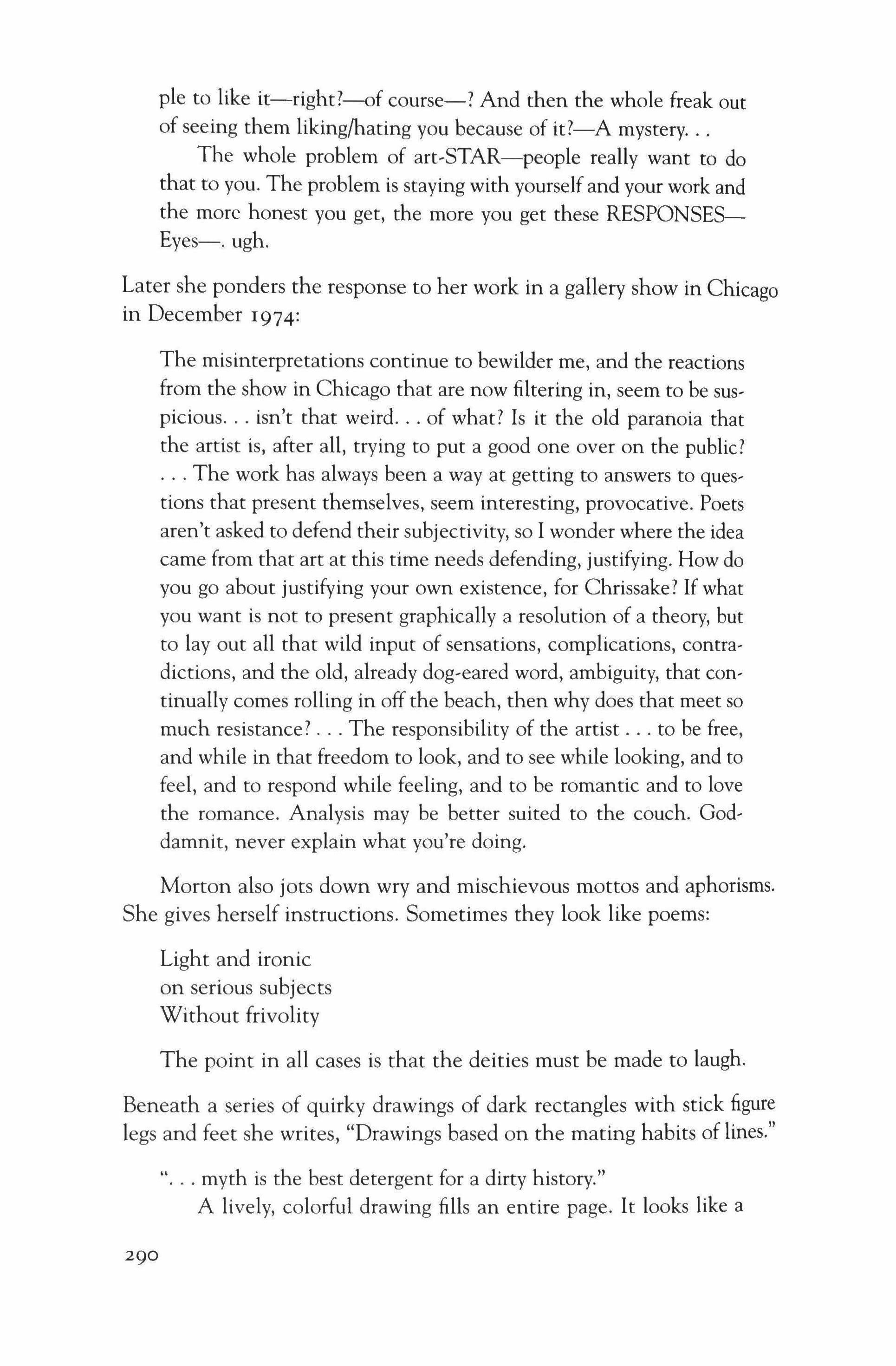
ple to like it-right?-of course-? And then the whole freak out of seeing them liking/hating you because of it?-A mystery
The whole problem of art,STAR-people really want to do that to you. The problem is staying with yourself and your work and the more honest you get, the more you get these RESPONSESEyes-. ugh.
Later she ponders the response to her work in a gallery show in Chicago in December 1974:
The misinterpretations continue to bewilder me, and the reactions from the show in Chicago that are now filtering in, seem to be sus' picious isn't that weird of what? Is it the old paranoia that the artist is, after all, trying to put a good one over on the public?
The work has always been a way at getting to answers to questions that present themselves, seem interesting, provocative. Poets aren't asked to defend their subjectivity, so I wonder where the idea came from that art at this time needs defending, justifying. How do you go about justifying your own existence, for Chrissake? If what you want is not to present graphically a resolution of a theory, but to layout all that wild input of sensations, complications, contra' dictions, and the old, already dog,eared word, ambiguity, that con, tinually comes rolling in off the beach, then why does that meet so much resistance? The responsibility of the artist to be free, and while in that freedom to look, and to see while looking, and to feel, and to respond while feeling, and to be romantic and to love the romance. Analysis may be better suited to the couch. God, damnit, never explain what you're doing.
Morton also jots down wry and mischievous mottos and aphorisms. She gives herself instructions. Sometimes they look like poems:
Light and ironic on serious subjects
Without frivolity
The point in all cases is that the deities must be made to laugh.
Beneath a series of quirky drawings of dark rectangles with stick figure legs and feet she writes, "Drawings based on the mating habits of lines." myth is the best detergent for a dirty history."
A lively, colorful drawing fills an entire page. It looks like a
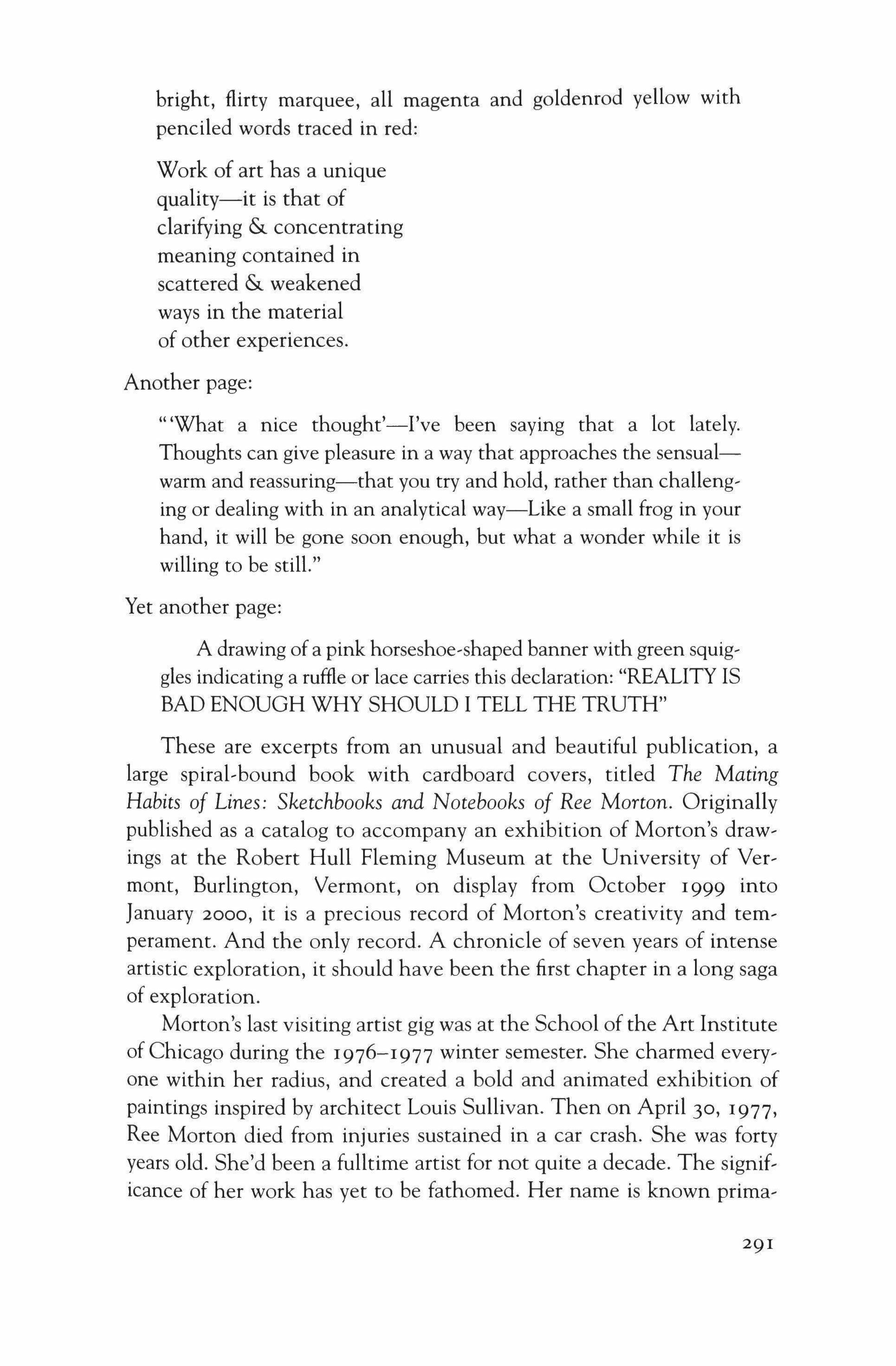
bright, flirty marquee, all magenta and goldenrod yellow with penciled words traced in red:
Work of art has a unique quality-it is that of clarifying & concentrating meaning contained in scattered & weakened ways in the material of other experiences.
Another page:
"'What a nice thought'-I've been saying that a lot lately. Thoughts can give pleasure in a way that approaches the sensualwarm and reassuring-that you try and hold, rather than challenging or dealing with in an analytical way-Like a small frog in your hand, it will be gone soon enough, but what a wonder while it is willing to be still."
Yet another page:
A drawing of a pink horseshoe-shaped banner with green squiggles indicating a ruffle or lace carries this declaration: "REALITY IS BAD ENOUGH WHY SHOULD I TELL THE TRUTH"
These are excerpts from an unusual and beautiful publication, a large spiral-bound book with cardboard covers, titled The Mating Habits of Lines: Sketchbooks and Notebooks of Ree Morton. Originally published as a catalog to accompany an exhibition of Morton's drawings at the Robert Hull Fleming Museum at the University of Vermont, Burlington, Vermont, on display from October 1999 into January 2000, it is a precious record of Morton's creativity and temperament. And the only record. A chronicle of seven years of intense artistic exploration, it should have been the first chapter in a long saga of exploration.
Morton's last visiting artist gig was at the School of the Art Institute of Chicago during the 1976-1977 winter semester. She charmed everyone within her radius, and created a bold and animated exhibition of paintings inspired by architect Louis Sullivan. Then on April 30, 1977, Ree Morton died from injuries sustained in a car crash. She was forty years old. She'd been a fulltime artist for not quite a decade. The significance of her work has yet to be fathomed. Her name is known prima-
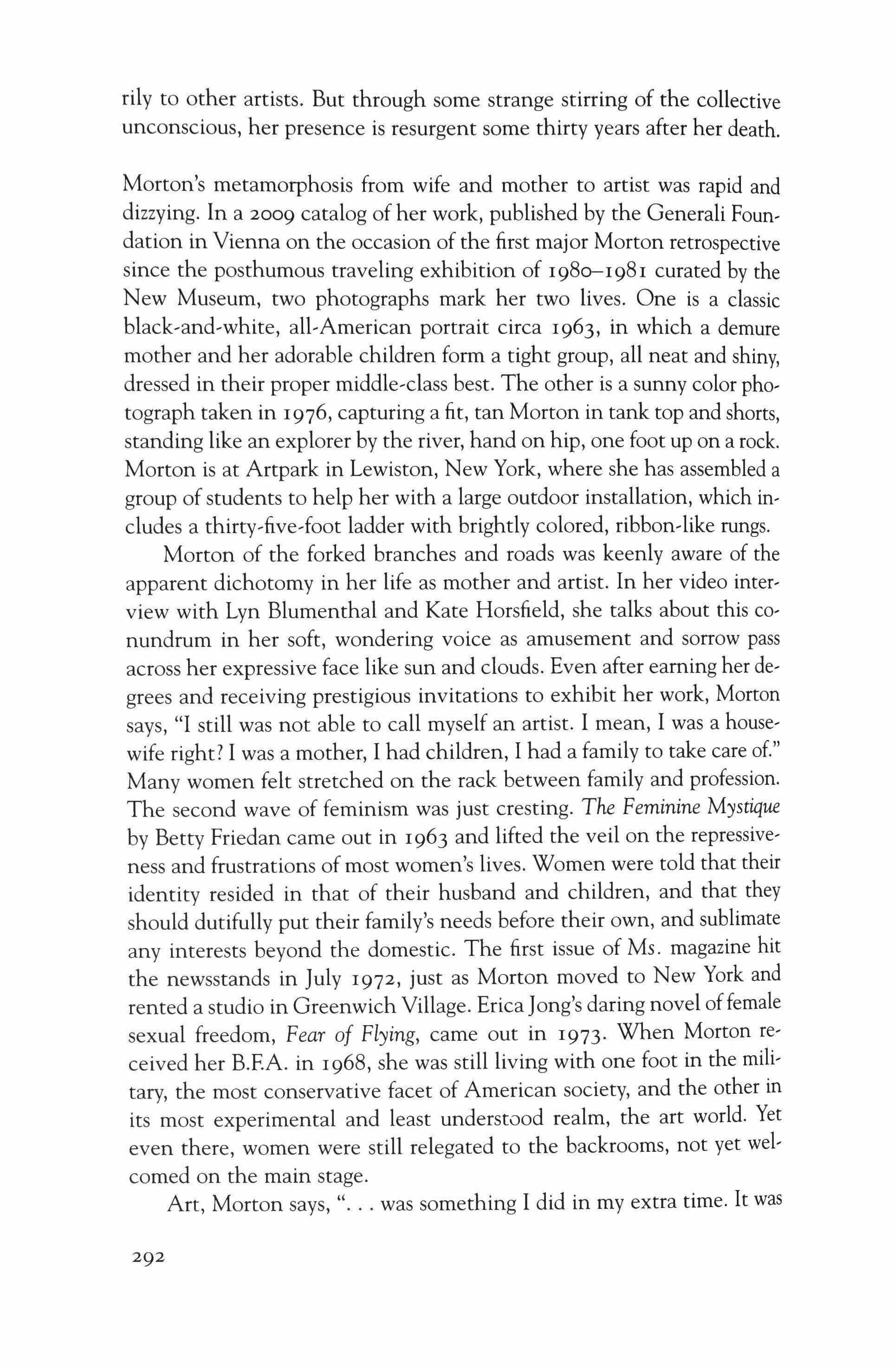
rily to other artists. But through some strange stirring of the collective unconscious, her presence is resurgent some thirty years after her death.
Morton's metamorphosis from wife and mother to artist was rapid and dizzying. In a 2009 catalog of her work, published by the Generali Foundation in Vienna on the occasion of the first major Morton retrospective since the posthumous traveling exhibition of 1980-1981 curated by the New Museum, two photographs mark her two lives. One is a classic black-and-white, all-American portrait circa 1963, in which a demure mother and her adorable children form a tight group, all neat and shiny, dressed in their proper middle-class best. The other is a sunny color photograph taken in 1976, capturing a fit, tan Morton in tank top and shorts, standing like an explorer by the river, hand on hip, one foot up on a rock. Morton is at Artpark in Lewiston, New York, where she has assembled a group of students to help her with a large outdoor installation, which includes a thirty-five-foot ladder with brightly colored, ribbon-like rungs. Morton of the forked branches and roads was keenly aware of the apparent dichotomy in her life as mother and artist. In her video interview with Lyn Blumenthal and Kate Horsfield, she talks about this conundrum in her soft, wondering voice as amusement and sorrow pass across her expressive face like sun and clouds. Even after earning her degrees and receiving prestigious invitations to exhibit her work, Morton says, "I still was not able to call myself an artist. I mean, I was a housewife right? I was a mother, I had children, I had a family to take care of." Many women felt stretched on the rack between family and profession. The second wave of feminism was just cresting. The Feminine Mystique by Betty Friedan came out in 1963 and lifted the veil on the repressiveness and frustrations of most women's lives. Women were told that their identity resided in that of their husband and children, and that they should dutifully put their family's needs before their own, and sublimate any interests beyond the domestic. The first issue of Ms. magazine hit the newsstands in July 1972, just as Morton moved to New York and rented a studio in Greenwich Village. Erica Jong's daring novel offemale sexual freedom, Fear of Flying, came out in 1973. When Morton received her B.F.A. in 1968, she was still living with one foot in the military, the most conservative facet of American society, and the other in its most experimental and least understood realm, the art world. Yet even there, women were still relegated to the backrooms, not yet welcomed on the main stage.
Art, Morton says, was something I did in my extra time. It was
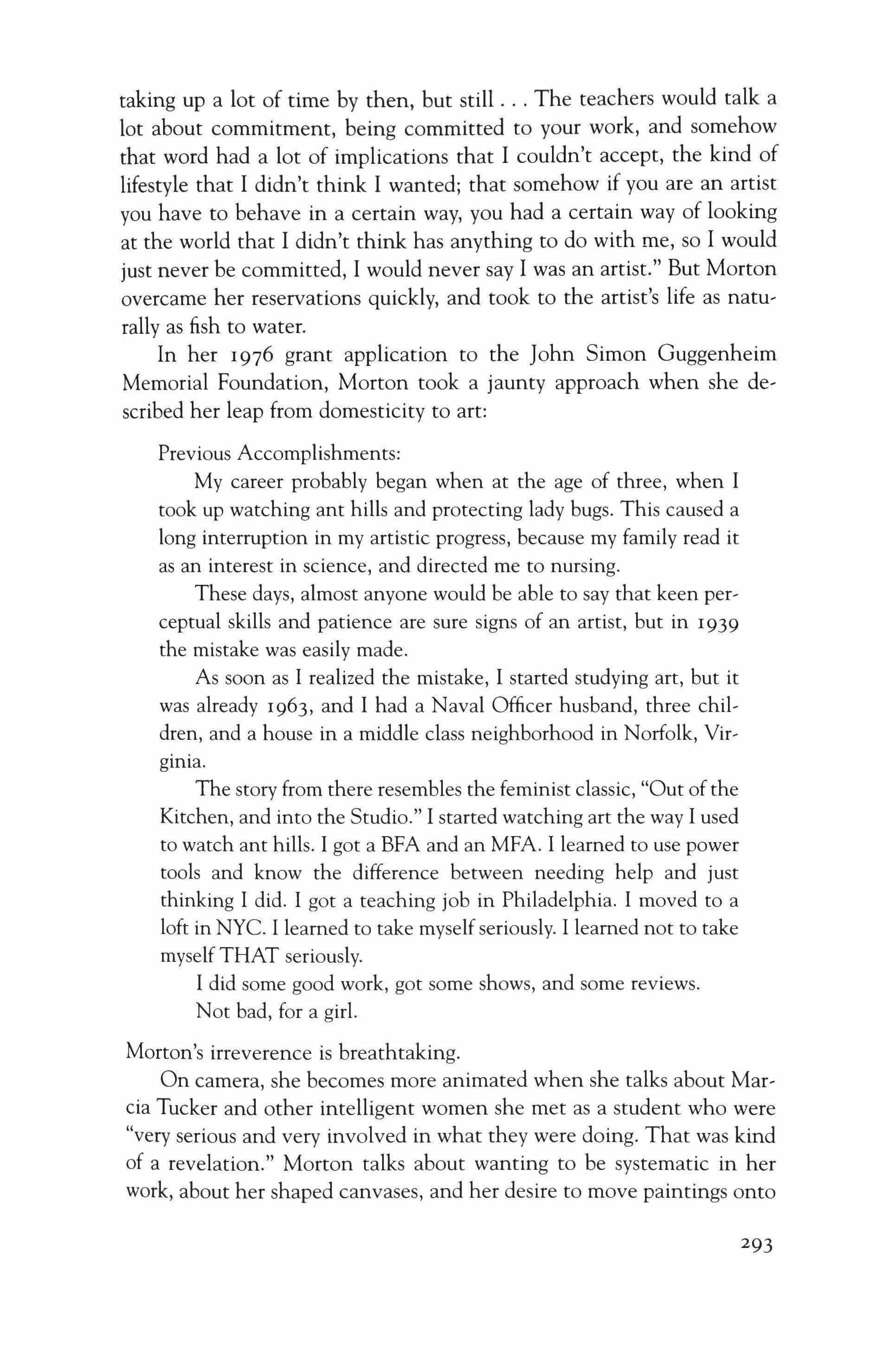
taking up a lot of time by then, but still The teachers would talk a lot about commitment, being committed to your work, and somehow that word had a lot of implications that I couldn't accept, the kind of lifestyle that I didn't think I wanted; that somehow if you are an artist you have to behave in a certain way, you had a certain way of looking at the world that I didn't think has anything to do with me, so I would just never be committed, I would never say I was an artist." But Morton overcame her reservations quickly, and took to the artist's life as naturally as fish to water.
In her 1976 grant application to the John Simon Guggenheim Memorial Foundation, Morton took a jaunty approach when she described her leap from domesticity to art:
Previous Accomplishments:
My career probably began when at the age of three, when I took up watching ant hills and protecting lady bugs. This caused a long interruption in my artistic progress, because my family read it as an interest in science, and directed me to nursing.
These days, almost anyone would be able to say that keen perceptual skills and patience are sure signs of an artist, but in 1939 the mistake was easily made.
As soon as I realized the mistake, I started studying art, but it was already 1963, and I had a Naval Officer husband, three children, and a house in a middle class neighborhood in Norfolk, Virginia.
The story from there resembles the feminist classic, "Out of the Kitchen, and into the Studio." I started watching art the way I used to watch ant hills. I got a BFA and an MFA. I learned to use power tools and know the difference between needing help and just thinking I did. I got a teaching job in Philadelphia. I moved to a loft in NYC. I learned to take myselfseriously. I learned not to take myself THAT seriously.
I did some good work, got some shows, and some reviews. Not bad, for a girl.
Morton's irreverence is breathtaking.
On camera, she becomes more animated when she talks about Marcia Tucker and other intelligent women she met as a student who were "very serious and very involved in what they were doing. That was kind of a revelation." Morton talks about wanting to be systematic in her work, about her shaped canvases, and her desire to move paintings onto
293
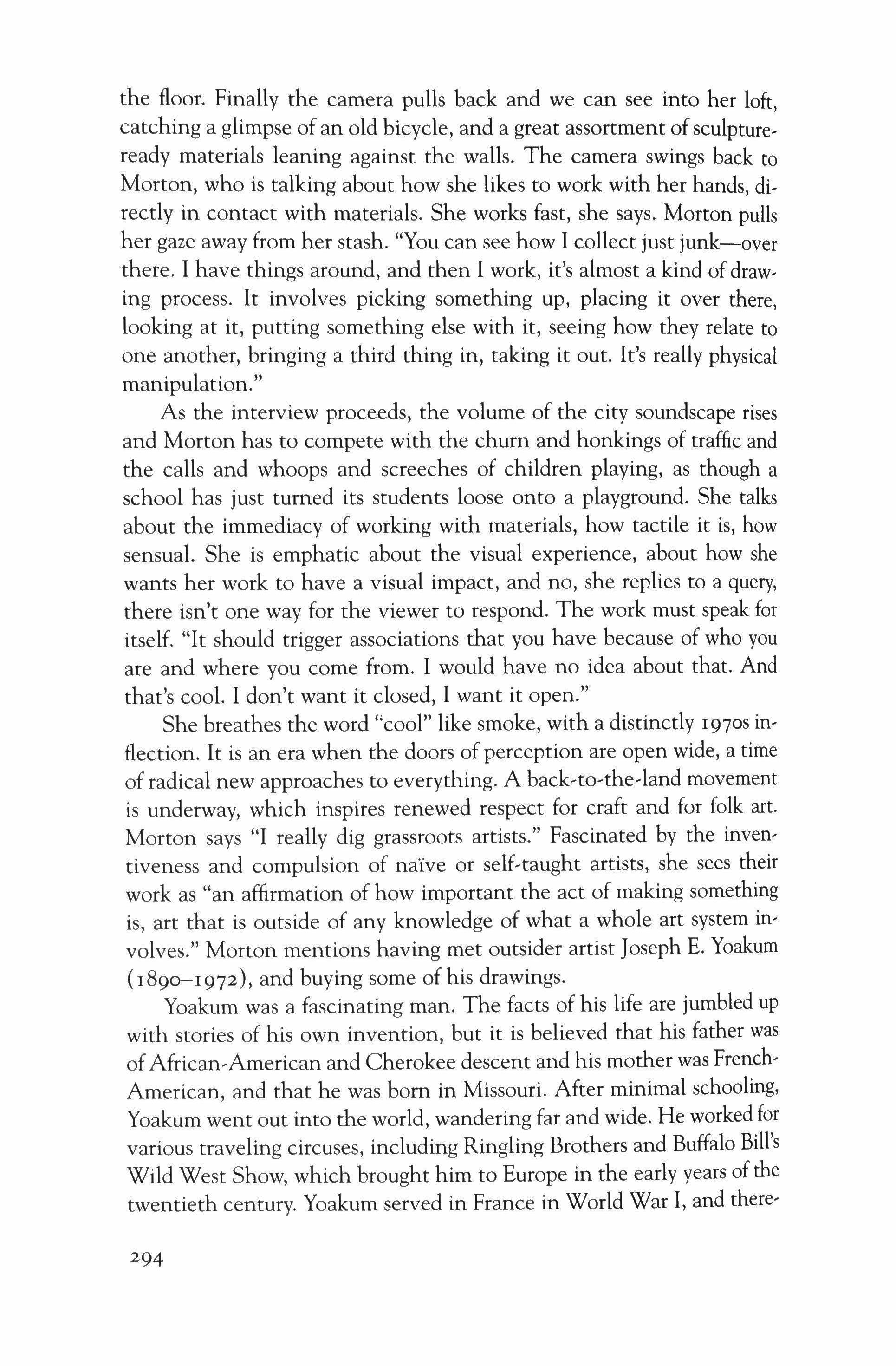
the floor. Finally the camera pulls back and we can see into her loft, catching a glimpse of an old bicycle, and a great assortment ofsculptureready materials leaning against the walls. The camera swings back to Morton, who is talking about how she likes to work with her hands, directly in contact with materials. She works fast, she says. Morton pulls her gaze away from her stash. "You can see how I collect just junk-over there. I have things around, and then I work, it's almost a kind of drawing process. It involves picking something up, placing it over there, looking at it, putting something else with it, seeing how they relate to one another, bringing a third thing in, taking it out. It's really physical manipulation."
As the interview proceeds, the volume of the city soundscape rises and Morton has to compete with the churn and honkings of traffic and the calls and whoops and screeches of children playing, as though a school has just turned its students loose onto a playground. She talks about the immediacy of working with materials, how tactile it is, how sensual. She is emphatic about the visual experience, about how she wants her work to have a visual impact, and no, she replies to a query, there isn't one way for the viewer to respond. The work must speak for itself. "It should trigger associations that you have because of who you are and where you come from. I would have no idea about that. And that's cool. I don't want it closed, I want it open."
She breathes the word "cool" like smoke, with a distinctly 1970S inflection. It is an era when the doors of perception are open wide, a time of radical new approaches to everything. A back-to-the-land movement is underway, which inspires renewed respect for craft and for folk art. Morton says "I really dig grassroots artists." Fascinated by the inventiveness and compulsion of naive or self-taught artists, she sees their work as "an affirmation of how important the act of making something is, art that is outside of any knowledge of what a whole art system involves." Morton mentions having met outsider artist Joseph E. Yoakum ( 189°-1972), and buying some of his drawings.
Yoakum was a fascinating man, The facts of his life are jumbled up with stories of his own invention, but it is believed that his father was ofAfrican-American and Cherokee descent and his mother was FrenchAmerican, and that he was born in Missouri. After minimal schooling, Yoakum went out into the world, wandering far and wide, He worked for various traveling circuses, including Ringling Brothers and Buffalo Bill's Wild West Show, which brought him to Europe in the early years of the twentieth century. Yoakum served in France in World War I, and there-
294
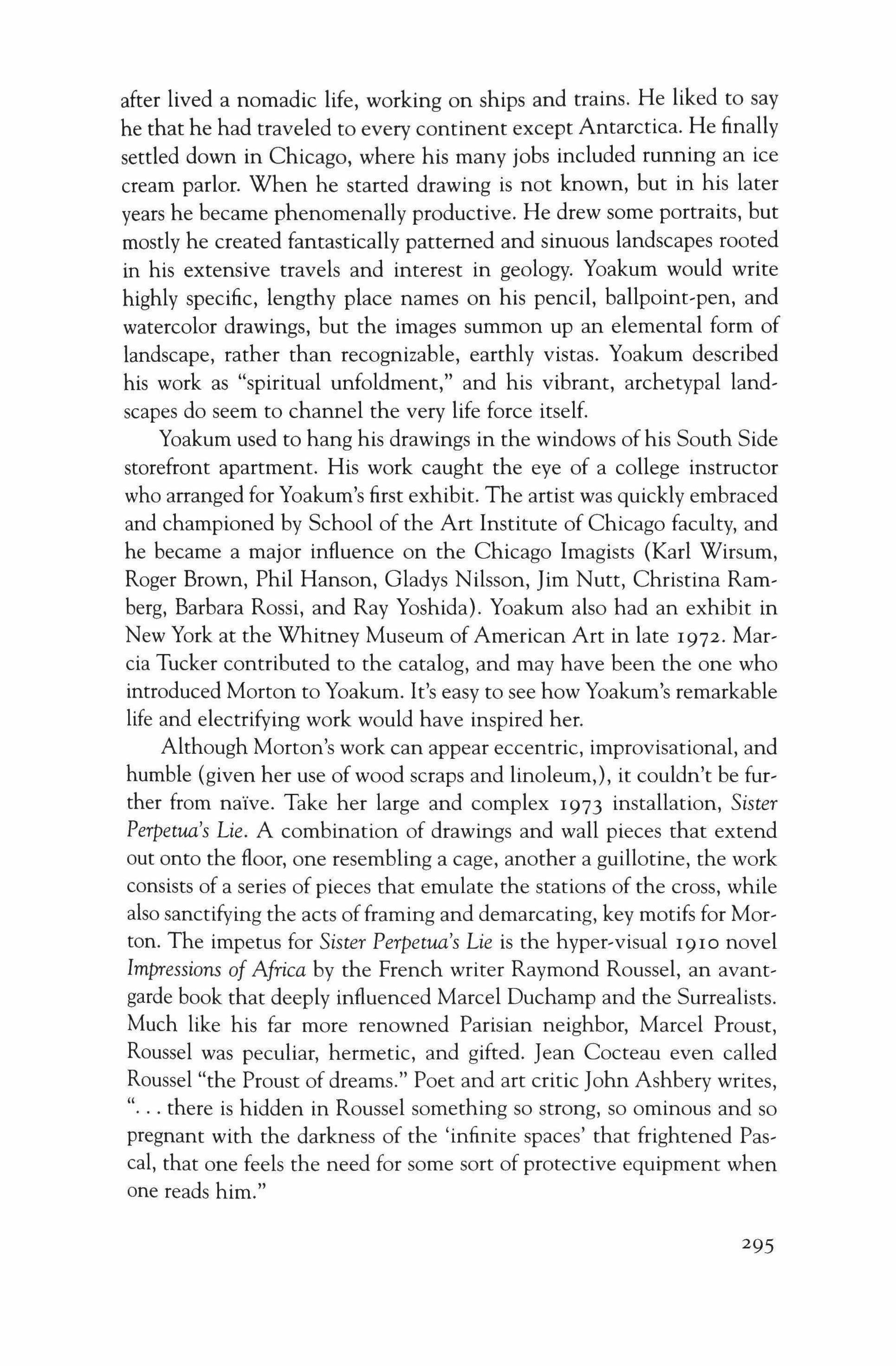
after lived a nomadic life, working on ships and trains. He liked to say he that he had traveled to every continent except Antarctica. He finally settled down in Chicago, where his many jobs included running an ice cream parlor. When he started drawing is not known, but in his later years he became phenomenally productive. He drew some portraits, but mostly he created fantastically patterned and sinuous landscapes rooted in his extensive travels and interest in geology. Yoakum would write highly specific, lengthy place names on his pencil, ballpoint-pen, and watercolor drawings, but the images summon up an elemental form of landscape, rather than recognizable, earthly vistas. Yoakum described his work as "spiritual unfoldment," and his vibrant, archetypal landscapes do seem to channel the very life force itself.
Yoakum used to hang his drawings in the windows of his South Side storefront apartment. His work caught the eye of a college instructor who arranged for Yoakum's first exhibit. The artist was quickly embraced and championed by School of the Art Institute of Chicago faculty, and he became a major influence on the Chicago Imagists {Karl Wirsum, Roger Brown, Phil Hanson, Gladys Nilsson, Jim Nutt, Christina Ramberg, Barbara Rossi, and Ray Yoshida}. Yoakum also had an exhibit in New York at the Whitney Museum of American Art in late I972. Marcia Tucker contributed to the catalog, and may have been the one who introduced Morton to Yoakum. It's easy to see how Yoakum's remarkable life and electrifying work would have inspired her.
Although Morton's work can appear eccentric, improvisational, and humble {given her use of wood scraps and linoleum.), it couldn't be further from naive. Take her large and complex I973 installation, Sister Perpetua's Lie. A combination of drawings and wall pieces that extend out onto the floor, one resembling a cage, another a guillotine, the work consists of a series of pieces that emulate the stations of the cross, while also sanctifying the acts offraming and demarcating, key motifs for Morton. The impetus for Sister Perpetua's Lie is the hyper-visual I9IO novel Impressions ofAfrica by the French writer Raymond Roussel, an avantgarde book that deeply influenced Marcel Duchamp and the Surrealists. Much like his far more renowned Parisian neighbor, Marcel Proust, Roussel was peculiar, hermetic, and gifted. Jean Cocteau even called Roussel "the Proust of dreams." Poet and art critic John Ashbery writes, there is hidden in Roussel something so strong, so ominous and so pregnant with the darkness of the 'infinite spaces' that frightened Pascal, that one feels the need for some sort of protective equipment when one reads him."
295
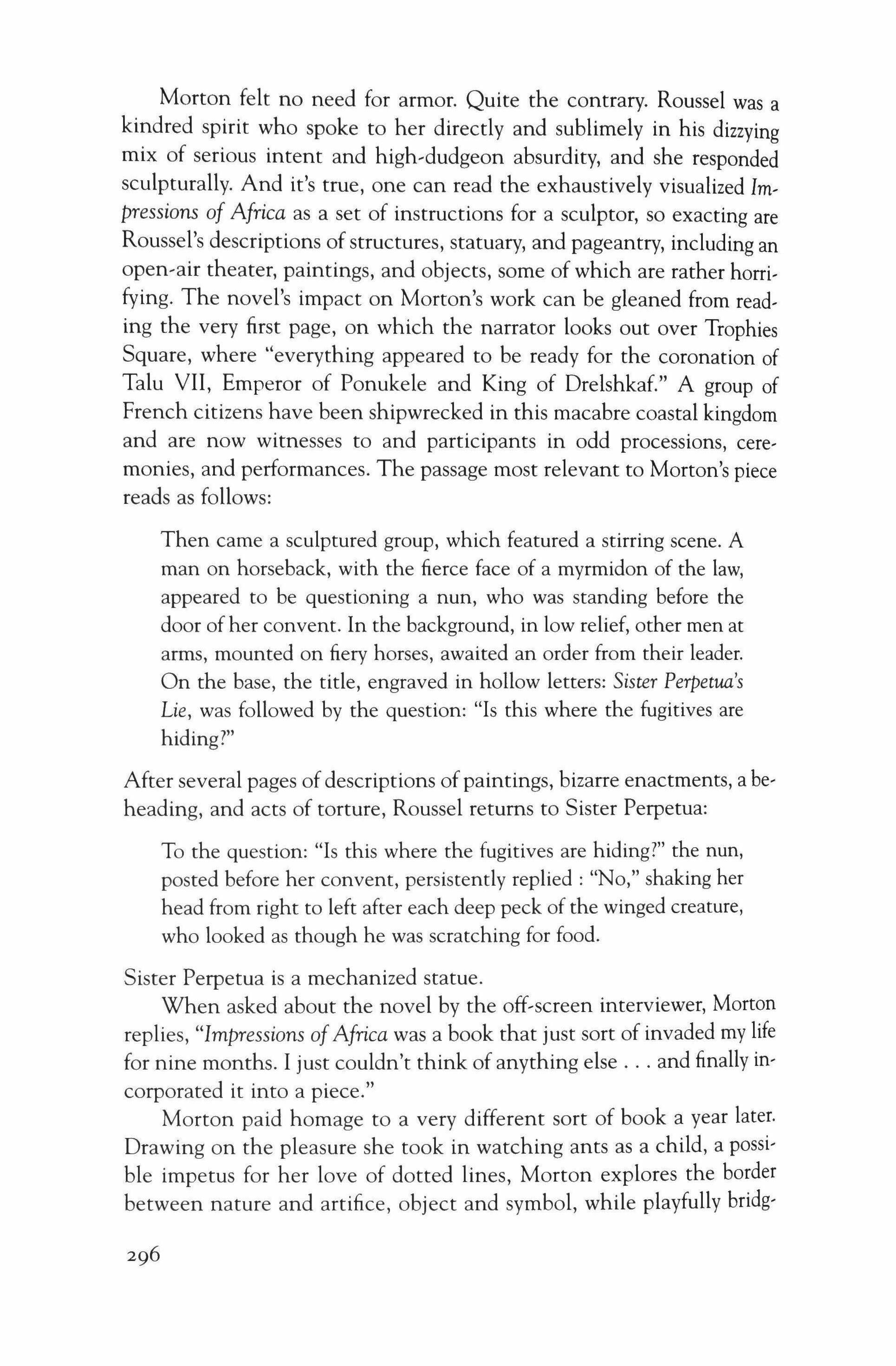
Morton felt no need for armor. Quite the contrary. Roussel was a kindred spirit who spoke to her directly and sublimely in his dizzying mix of serious intent and high-dudgeon absurdity, and she responded sculpturally. And it's true, one can read the exhaustively visualized Impressions of Africa as a set of instructions for a sculptor, so exacting are Roussel's descriptions of structures, statuary, and pageantry, including an open-air theater, paintings, and objects, some of which are rather horrifying. The novel's impact on Morton's work can be gleaned from reading the very first page, on which the narrator looks out over Trophies Square, where "everything appeared to be ready for the coronation of Talu VII, Emperor of Ponukele and King of Drelshkaf." A group of French citizens have been shipwrecked in this macabre coastal kingdom and are now witnesses to and participants in odd processions, ceremonies, and performances. The passage most relevant to Morton's piece reads as follows:
Then came a sculptured group, which featured a stirring scene. A man on horseback, with the fierce face of a myrmidon of the law, appeared to be questioning a nun, who was standing before the door ofher convent. In the background, in low relief, other men at arms, mounted on fiery horses, awaited an order from their leader. On the base, the title, engraved in hollow letters: Sister Perpetua's Lie, was followed by the question: "Is this where the fugitives are hiding?"
After several pages ofdescriptions ofpaintings, bizarre enactments, a beheading, and acts of torture, Roussel returns to Sister Perpetua:
To the question: "Is this where the fugitives are hiding?" the nun, posted before her convent, persistently replied: "No," shaking her head from right to left after each deep peck of the winged creature, who looked as though he was scratching for food.
Sister Perpetua is a mechanized statue.
When asked about the novel by the off,screen interviewer, Morton replies, "Impressions ofAfrica was a book that just sort of invaded my life for nine months. I just couldn't think of anything else and finally incorporated it into a piece."
Morton paid homage to a very different sort of book a year later. Drawing on the pleasure she took in watching ants as a child, a possible impetus for her love of dotted lines, Morton explores the border between nature and artifice, object and symbol, while playfully bridg-
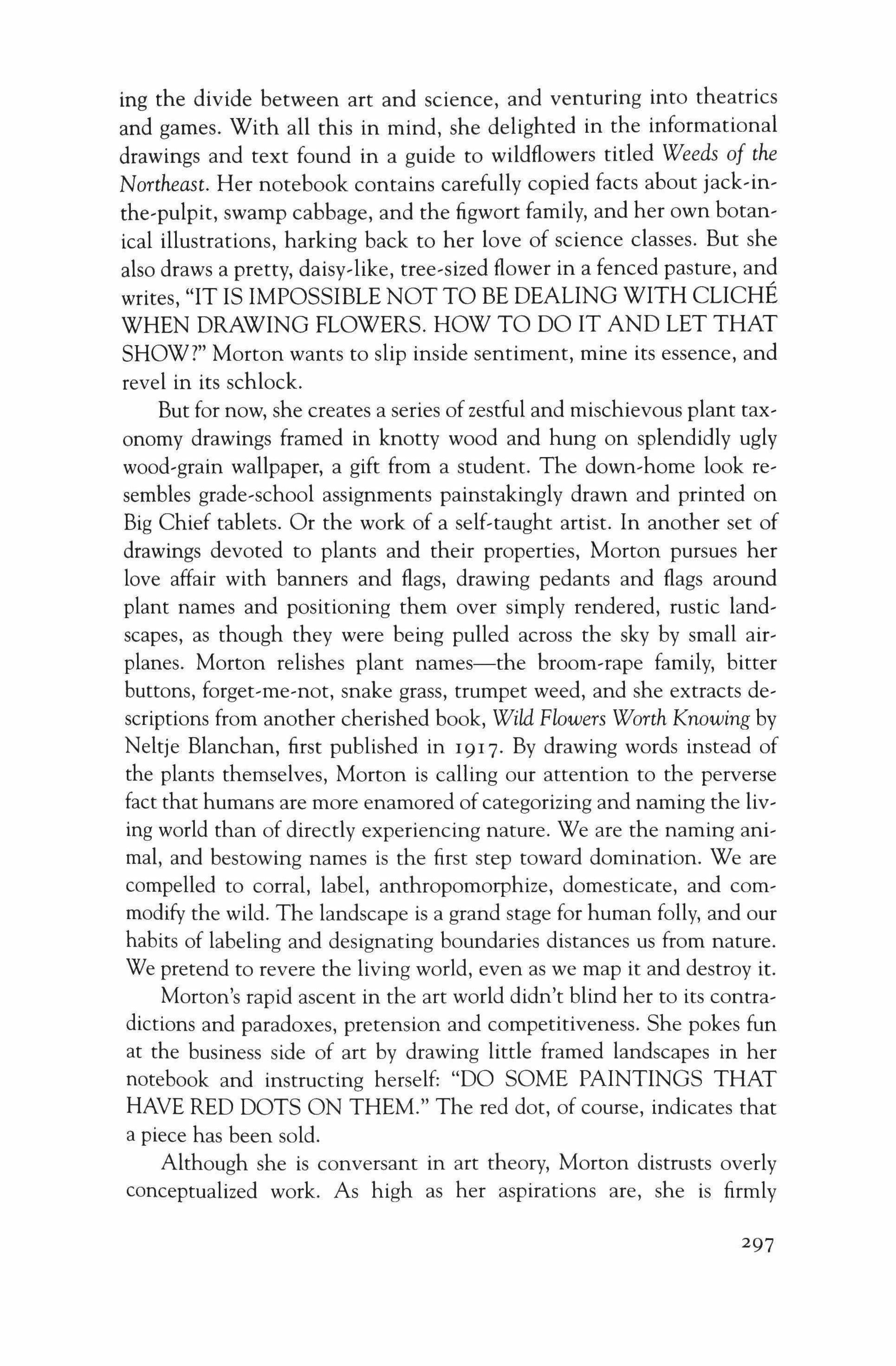
ing the divide between art and science, and venturing into theatrics and games. With all this in mind, she delighted in the informational drawings and text found in a guide to wildflowers titled Weeds of the Northeast. Her notebook contains carefully copied facts about jack-inthe-pulpit, swamp cabbage, and the figwort family, and her own botanical illustrations, harking back to her love of science classes. But she also draws a pretty, daisy,like, tree-sized flower in a fenced pasture, and writes, "IT IS IMPOSSIBLE NOT TO BE DEALING WITH CLICHE WHEN DRAWING FLOWERS. HOW TO DO IT AND LET THAT SHOW?" Morton wants to slip inside sentiment, mine its essence, and revel in its schlock.
But for now, she creates a series of zestful and mischievous plant tax, onomy drawings framed in knotty wood and hung on splendidly ugly wood,grain wallpaper, a gift from a student. The down-home look resembles grade-school assignments painstakingly drawn and printed on Big Chief tablets. Or the work of a self,taught artist. In another set of drawings devoted to plants and their properties, Morton pursues her love affair with banners and flags, drawing pedants and flags around plant names and positioning them over simply rendered, rustic land, scapes, as though they were being pulled across the sky by small air' planes. Morton relishes plant names-the broom,rape family, bitter buttons, forget-me-not, snake grass, trumpet weed, and she extracts de, scriptions from another cherished book, Wild Flowers Worth Knowing by Neltje Blanchan, first published in 1917. By drawing words instead of the plants themselves, Morton is calling our attention to the perverse fact that humans are more enamored of categorizing and naming the living world than of directly experiencing nature. We are the naming ani, mal, and bestowing names is the first step toward domination. We are compelled to corral, label, anthropomorphize, domesticate, and com, modify the wild. The landscape is a grand stage for human folly, and our habits of labeling and designating boundaries distances us from nature. We pretend to revere the living world, even as we map it and destroy it. Morton's rapid ascent in the art world didn't blind her to its contra, dictions and paradoxes, pretension and competitiveness. She pokes fun at the business side of art by drawing little framed landscapes in her notebook and instructing herself: "DO SOME PAINTINGS THAT HAVE RED DOTS ON THEM." The red dot, of course, indicates that a piece has been sold. Although she is conversant in art theory, Morton distrusts overly conceptualized work. As high as her aspirations are, she is firmly
297
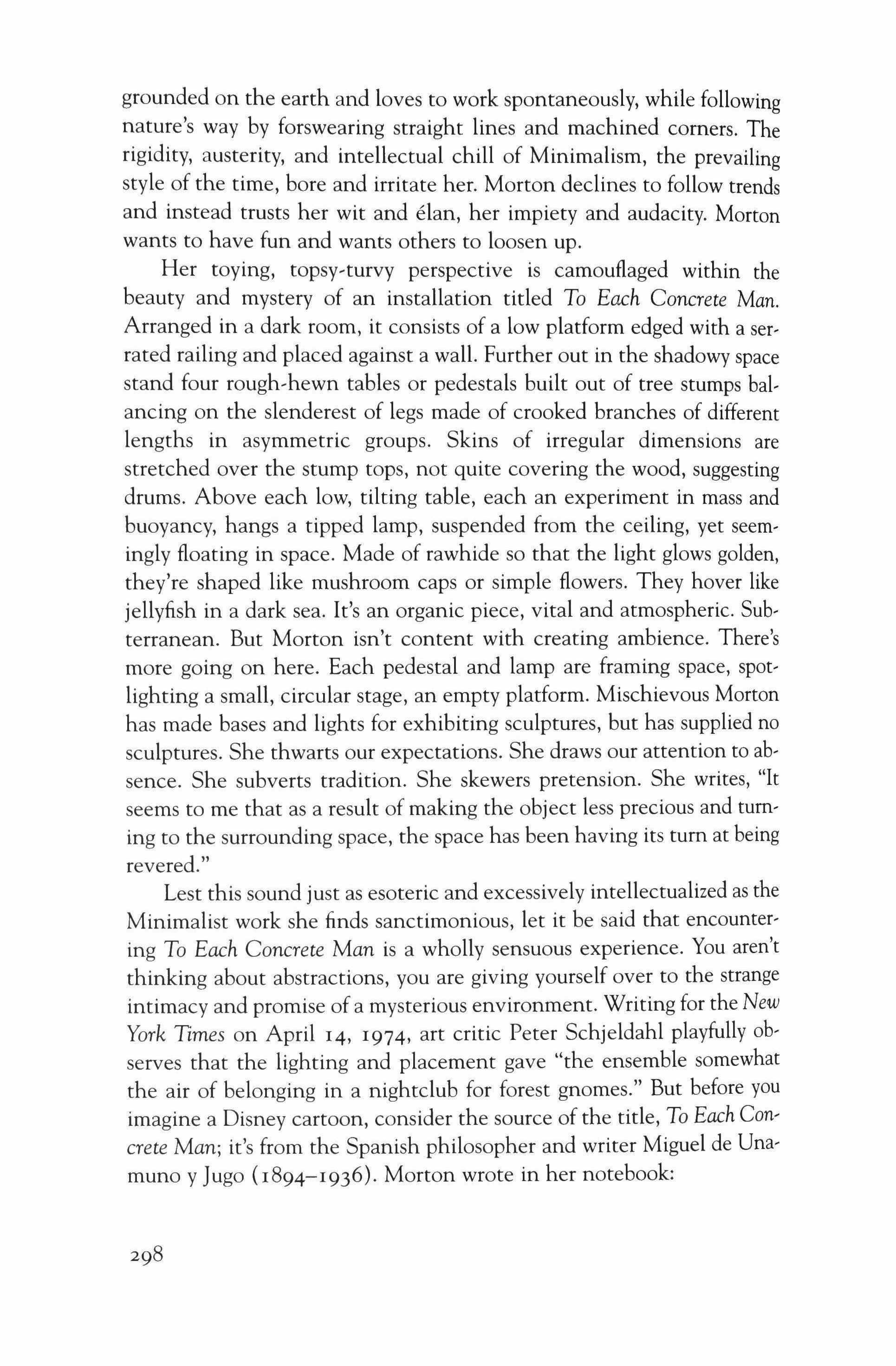
grounded on the earth and loves to work spontaneously, while following nature's way by forswearing straight lines and machined corners. The rigidity, austerity, and intellectual chill of Minimalism, the prevailing style of the time, bore and irritate her. Morton declines to follow trends and instead trusts her wit and elan, her impiety and audacity. Morton wants to have fun and wants others to loosen up.
Her toying, topsy-turvy perspective is camouflaged within the beauty and mystery of an installation titled To Each Concrete Man. Arranged in a dark room, it consists of a low platform edged with a serrated railing and placed against a wall. Further out in the shadowy space stand four rough-hewn tables or pedestals built out of tree stumps balancing on the slenderest of legs made of crooked branches of different lengths in asymmetric groups. Skins of irregular dimensions are stretched over the stump tops, not quite covering the wood, suggesting drums. Above each low, tilting table, each an experiment in mass and buoyancy, hangs a tipped lamp, suspended from the ceiling, yet seemingly floating in space. Made of rawhide so that the light glows golden, they're shaped like mushroom caps or simple flowers. They hover like jellyfish in a dark sea. It's an organic piece, vital and atmospheric. Subterranean. But Morton isn't content with creating ambience. There's more going on here. Each pedestal and lamp are framing space, spotlighting a small, circular stage, an empty platform. Mischievous Morton has made bases and lights for exhibiting sculptures, but has supplied no sculptures. She thwarts our expectations. She draws our attention to absence. She subverts tradition. She skewers pretension. She writes, "It seems to me that as a result of making the object less precious and tuming to the surrounding space, the space has been having its turn at being revered."
Lest this sound just as esoteric and excessively intellectualized as the Minimalist work she finds sanctimonious, let it be said that encountering To Each Concrete Man is a wholly sensuous experience. You aren't thinking about abstractions, you are giving yourself over to the strange intimacy and promise of a mysterious environment. Writing for the New York Times on April 14, 1974, art critic Peter Schjeldahl playfully observes that the lighting and placement gave "the ensemble somewhat the air of belonging in a nightclub for forest gnomes." But before you imagine a Disney cartoon, consider the source of the title, To Each Concrete Man; it's from the Spanish philosopher and writer Miguel de Unamuno y [ugo (1894-1936). Morton wrote in her notebook:
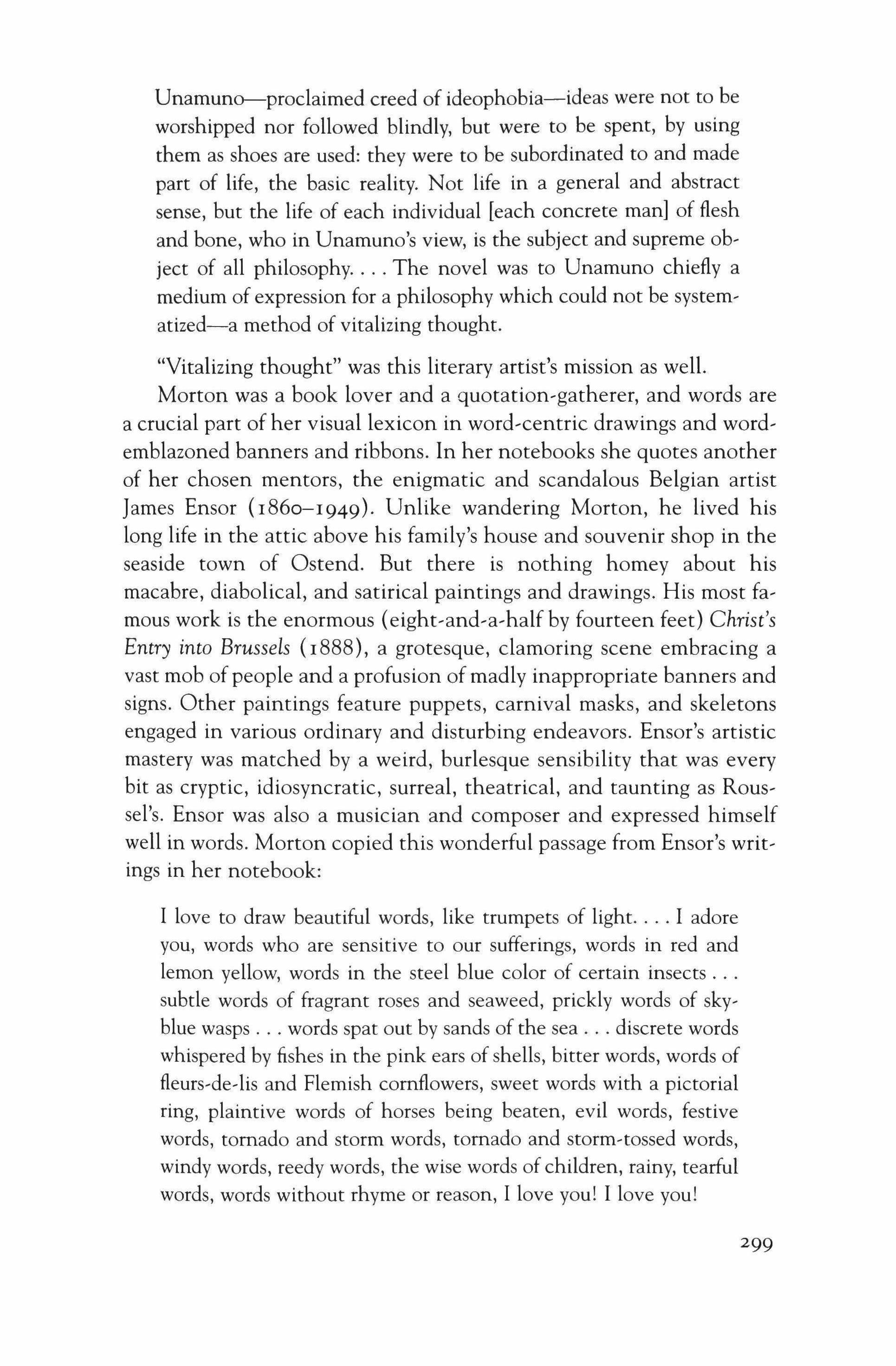
Unamuno-proclaimed creed of ideophobia-ideas were not to be worshipped nor followed blindly, but were to be spent, by using them as shoes are used: they were to be subordinated to and made part of life, the basic reality. Not life in a general and abstract sense, but the life of each individual [each concrete man] of flesh and bone, who in Unamuno's view, is the subject and supreme object of all philosophy The novel was to Unamuno chiefly a medium of expression for a philosophy which could not be systematized-a method of vitalizing thought.
"Vitalizing thought" was this literary artist's mission as well. Morton was a book lover and a quotation-gatherer, and words are a crucial part of her visual lexicon in word-centric drawings and wordemblazoned banners and ribbons. In her notebooks she quotes another of her chosen mentors, the enigmatic and scandalous Belgian artist James Ensor (1860-1949). Unlike wandering Morton, he lived his long life in the attic above his family's house and souvenir shop in the seaside town of Ostend. But there is nothing homey about his macabre, diabolical, and satirical paintings and drawings. His most famous work is the enormous (eight-and-a-half by fourteen feet) Christ's Entry into Brussels (1888), a grotesque, clamoring scene embracing a vast mob ofpeople and a profusion of madly inappropriate banners and signs. Other paintings feature puppets, carnival masks, and skeletons engaged in various ordinary and disturbing endeavors. Ensor's artistic mastery was matched by a weird, burlesque sensibility that was every bit as cryptic, idiosyncratic, surreal, theatrical, and taunting as Roussel's. Ensor was also a musician and composer and expressed himself well in words. Morton copied this wonderful passage from Ensor's writings in her notebook:
I love to draw beautiful words, like trumpets of light I adore you, words who are sensitive to our sufferings, words in red and lemon yellow, words in the steel blue color of certain insects subtle words of fragrant roses and seaweed, prickly words of skyblue wasps words spat out by sands of the sea discrete words whispered by fishes in the pink ears of shells, bitter words, words of fleurs-de-lis and Flemish cornflowers, sweet words with a pictorial ring, plaintive words of horses being beaten, evil words, festive words, tornado and storm words, tornado and storm-tossed words, windy words, reedy words, the wise words of children, rainy, tearful words, words without rhyme or reason, I love you! I love you!
299
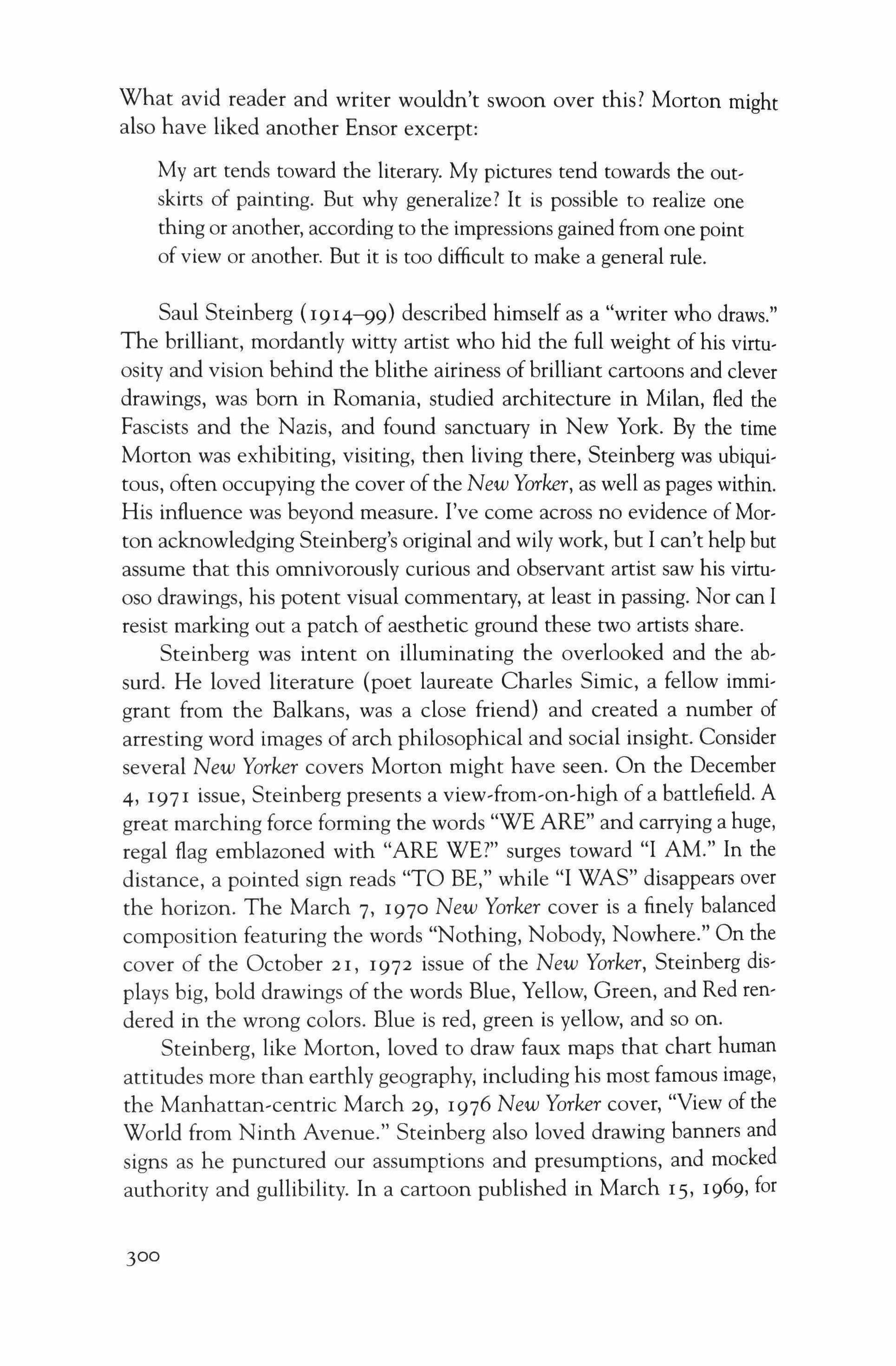
What avid reader and writer wouldn't swoon over this? Morton might also have liked another Ensor excerpt:
My art tends toward the literary. My pictures tend towards the outskirts of painting. But why generalize? It is possible to realize one thing or another, according to the impressions gained from one point of view or another. But it is too difficult to make a general rule.
Saul Steinberg (1914-99) described himself as a "writer who draws." The brilliant, mordantly witty artist who hid the full weight of his virtuosity and vision behind the blithe airiness of brilliant cartoons and clever drawings, was born in Romania, studied architecture in Milan, fled the Fascists and the Nazis, and found sanctuary in New York. By the time Morton was exhibiting, visiting, then living there, Steinberg was ubiquitous, often occupying the cover ofthe New Yorker, as well as pages within. His influence was beyond measure. I've come across no evidence of Morton acknowledging Steinberg's original and wily work, but I can't help but assume that this omnivorously curious and observant artist saw his virtuoso drawings, his potent visual commentary, at least in passing. Nor can I resist marking out a patch of aesthetic ground these two artists share.
Steinberg was intent on illuminating the overlooked and the absurd. He loved literature (poet laureate Charles Simic, a fellow immigrant from the Balkans, was a close friend) and created a number of arresting word images of arch philosophical and social insight. Consider several New Yorker covers Morton might have seen. On the December 4, 1971 issue, Steinberg presents a view-from-on-high of a battlefield. A great marching force forming the words "WE ARE" and carrying a huge, regal flag emblazoned with "ARE WE?" surges toward "I AM." In the distance, a pointed sign reads "TO BE," while "I WAS" disappears over the horizon. The March 7, 1970 New Yorker cover is a finely balanced composition featuring the words "Nothing, Nobody, Nowhere." On the cover of the October 2 I, 1972 issue of the New Yorker, Steinberg displays big, bold drawings of the words Blue, Yellow, Green, and Red rendered in the wrong colors. Blue is red, green is yellow, and so on.
Steinberg, like Morton, loved to draw faux maps that chart human attitudes more than earthly geography, including his most famous image, the Manhattan-centric March 29, 1976 New Yorker cover, "View of the World from Ninth Avenue." Steinberg also loved drawing banners and signs as he punctured our assumptions and presumptions, and mocked authority and gullibility. In a cartoon published in March 15, 1969, for
300
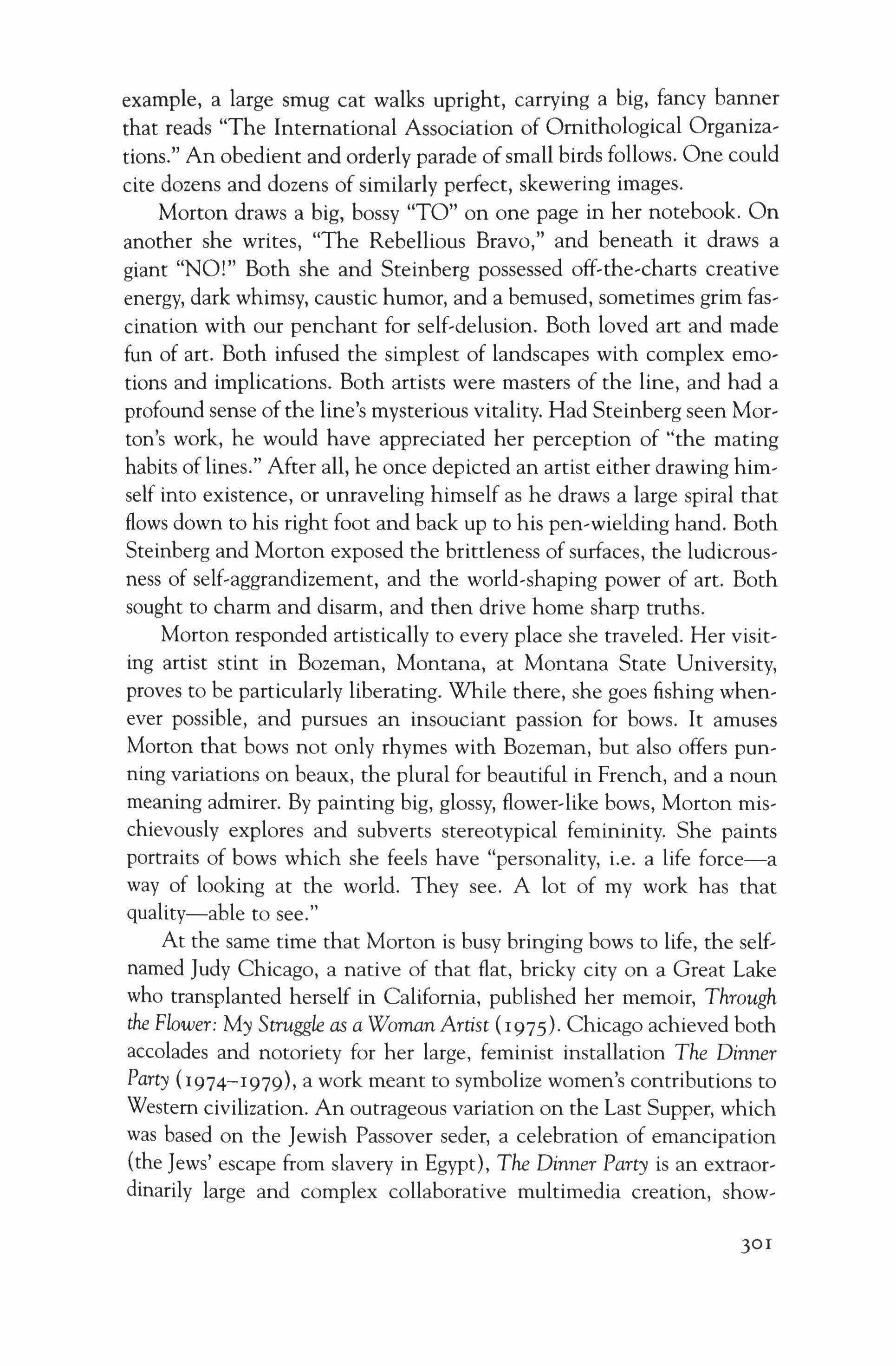
example, a large smug cat walks upright, carrying a big, fancy banner that reads "The International Association of Ornithological Organizations." An obedient and orderly parade ofsmall birds follows. One could cite dozens and dozens of similarly perfect, skewering images.
Morton draws a big, bossy "TO" on one page in her notebook. On another she writes, "The Rebellious Bravo," and beneath it draws a giant "NO!" Both she and Steinberg possessed off-the-charts creative energy, dark whimsy, caustic humor, and a bemused, sometimes grim fascination with our penchant for self-delusion. Both loved art and made fun of art. Both infused the simplest of landscapes with complex emotions and implications. Both artists were masters of the line, and had a profound sense of the line's mysterious vitality. Had Steinberg seen Morton's work, he would have appreciated her perception of "the mating habits of lines." After all, he once depicted an artist either drawing him, self into existence, or unraveling himself as he draws a large spiral that flows down to his right foot and back up to his pen-wielding hand. Both Steinberg and Morton exposed the brittleness of surfaces, the ludicrous, ness of self,aggrandizement, and the world-shaping power of art. Both sought to charm and disarm, and then drive home sharp truths.
Morton responded artistically to every place she traveled. Her visit, ing artist stint in Bozeman, Montana, at Montana State University, proves to be particularly liberating. While there, she goes fishing when, ever possible, and pursues an insouciant passion for bows. It amuses Morton that bows not only rhymes with Bozeman, but also offers pun, ning variations on beaux, the plural for beautiful in French, and a noun meaning admirer. By painting big, glossy, flowedike bows, Morton mischievously explores and subverts stereotypical femininity. She paints portraits of bows which she feels have "personality, i.e. a life force-a way of looking at the world. They see. A lot of my work has that quality-able to see."
At the same time that Morton is busy bringing bows to life, the self, named Judy Chicago, a native of that flat, bricky city on a Great Lake who transplanted herself in California, published her memoir, Through the Flower: My Struggle as a Woman Artist (I975). Chicago achieved both accolades and notoriety for her large, feminist installation The Dinner Party (I974-I979), a work meant to symbolize women's contributions to Western civilization. An outrageous variation on the Last Supper, which was based on the Jewish Passover seder, a celebration of emancipation (the Jews' escape from slavery in Egypt), The Dinner Party is an extraordinarily large and complex collaborative multimedia creation, show,
30I
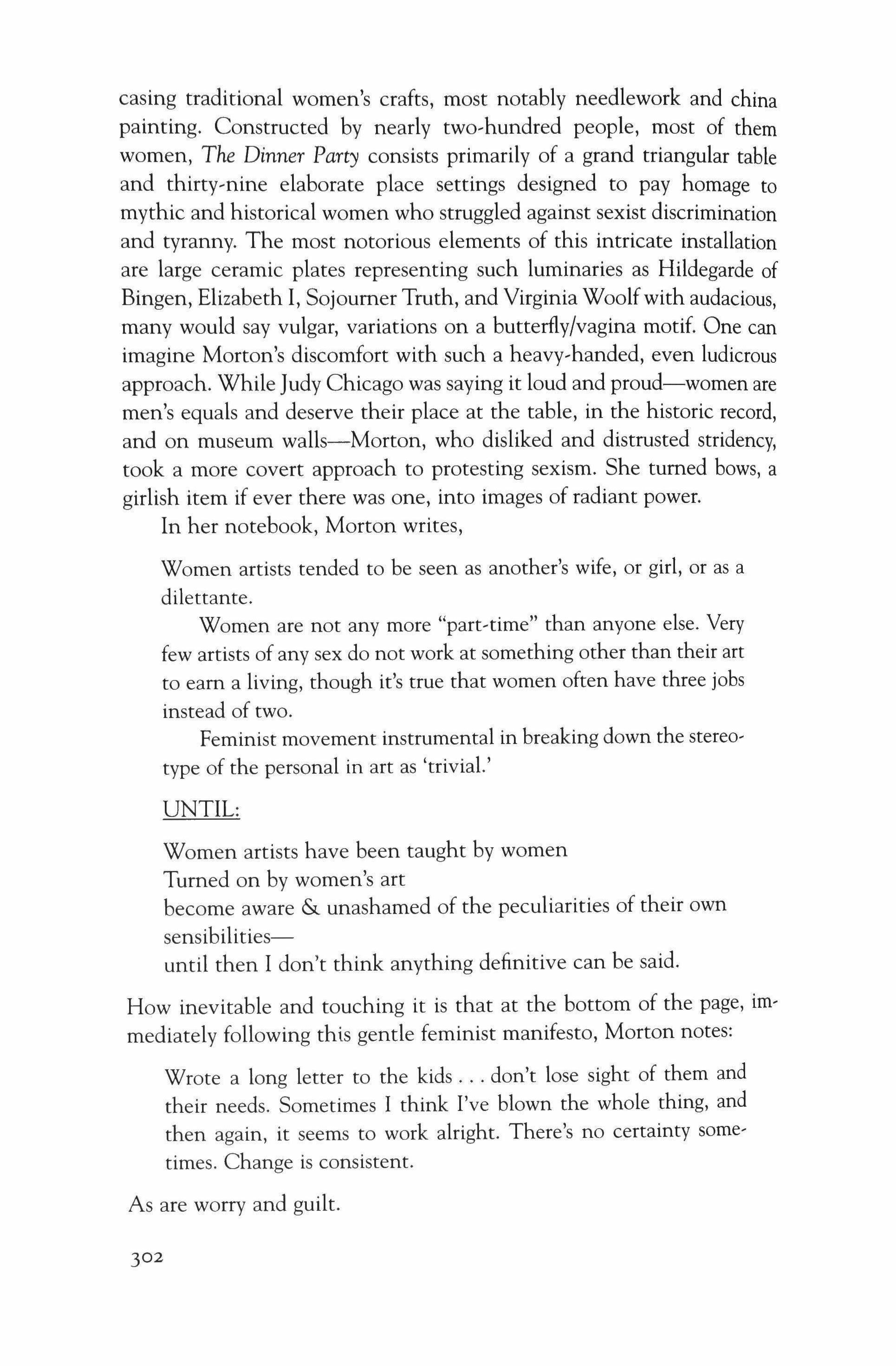
casing traditional women's crafts, most notably needlework and china painting. Constructed by nearly two-hundred people, most of them women, The Dinner Party consists primarily of a grand triangular table and thirty-nine elaborate place settings designed to pay homage to mythic and historical women who struggled against sexist discrimination and tyranny. The most notorious elements of this intricate installation are large ceramic plates representing such luminaries as Hildegarde of Bingen, Elizabeth I, Sojourner Truth, and Virginia Woolfwith audacious, many would say vulgar, variations on a butterfly/vagina motif. One can imagine Morton's discomfort with such a heavy-handed, even ludicrous approach. While Judy Chicago was saying it loud and proud-women are men's equals and deserve their place at the table, in the historic record, and on museum walls-Morton, who disliked and distrusted stridency, took a more covert approach to protesting sexism. She turned bows, a girlish item if ever there was one, into images of radiant power. In her notebook, Morton writes,
Women artists tended to be seen as another's wife, or girl, or as a dilettante.
Women are not any more "part-time" than anyone else. Very few artists of any sex do not work at something other than their art to earn a living, though it's true that women often have three jobs instead of two.
Feminist movement instrumental in breaking down the stereotype of the personal in art as 'trivial.'
UNTIL:
Women artists have been taught by women Turned on by women's art become aware & unashamed of the peculiarities of their own sensibilitiesuntil then I don't think anything definitive can be said.
How inevitable and touching it is that at the bottom of the page, immediately following this gentle feminist manifesto, Morton notes:
Wrote a long letter to the kids don't lose sight of them and their needs. Sometimes I think I've blown the whole thing, and then again, it seems to work alright. There's no certainty sometimes. Change is consistent.
As are worry and guilt.
302
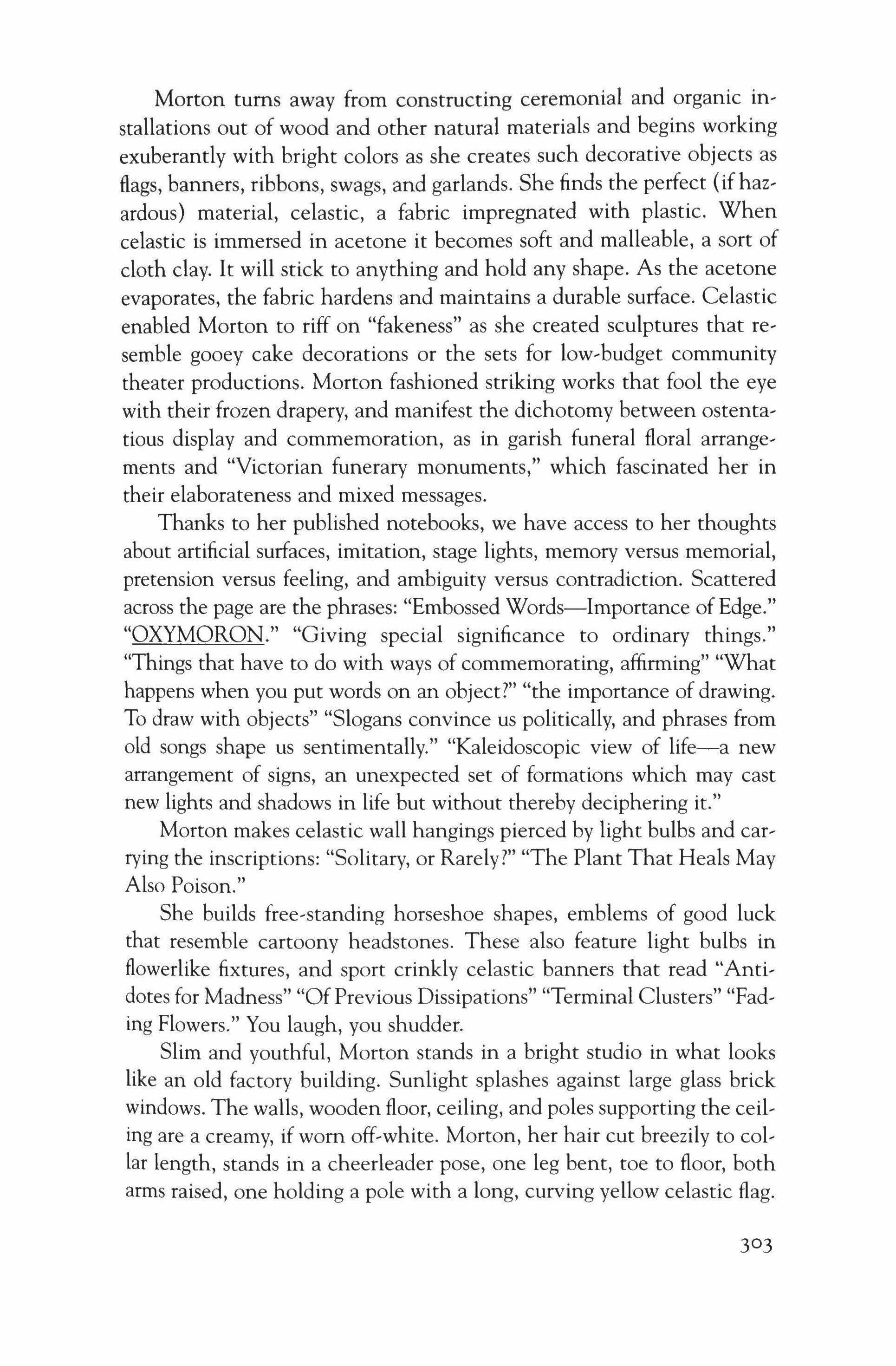
Morton turns away from constructing ceremonial and organic in, stallations out of wood and other natural materials and begins working exuberantly with bright colors as she creates such decorative objects as flags, banners, ribbons, swags, and garlands. She finds the perfect (ifhazardous) material, celastic, a fabric impregnated with plastic. When celastic is immersed in acetone it becomes soft and malleable, a sort of cloth clay. It will stick to anything and hold any shape. As the acetone evaporates, the fabric hardens and maintains a durable surface. Celastic enabled Morton to riff on "fakeness" as she created sculptures that resemble gooey cake decorations or the sets for low-budget community theater productions. Morton fashioned striking works that fool the eye with their frozen drapery, and manifest the dichotomy between ostenta, tious display and commemoration, as in garish funeral floral arrange' ments and "Victorian funerary monuments," which fascinated her in their elaborateness and mixed messages.
Thanks to her published notebooks, we have access to her thoughts about artificial surfaces, imitation, stage lights, memory versus memorial, pretension versus feeling, and ambiguity versus contradiction. Scattered across the page are the phrases: "Embossed Words-Importance of Edge." "OXYMORON." "Giving special significance to ordinary things." "Things that have to do with ways of commemorating, affirming" "What happens when you put words on an object?" "the importance of drawing. To draw with objects" "Slogans convince us politically, and phrases from old songs shape us sentimentally." "Kaleidoscopic view of life-a new arrangement of signs, an unexpected set of formations which may cast new lights and shadows in life but without thereby deciphering it."
Morton makes celastic wall hangings pierced by light bulbs and car, rying the inscriptions: "Solitary, or Rarely?" "The Plant That Heals May Also Poison."
She builds free-standing horseshoe shapes, emblems of good luck that resemble cartoony headstones. These also feature light bulbs in flowerlike fixtures, and sport crinkly celastic banners that read "Anti, dotes for Madness" "Of Previous Dissipations" "Terminal Clusters" "Fading Flowers." You laugh, you shudder.
Slim and youthful, Morton stands in a bright studio in what looks like an old factory building. Sunlight splashes against large glass brick windows. The walls, wooden floor, ceiling, and poles supporting the ceil, ing are a creamy, if worn off-white. Morton, her hair cut breezily to col, lar length, stands in a cheerleader pose, one leg bent, toe to floor, both arms raised, one holding a pole with a long, curving yellow celastic flag.
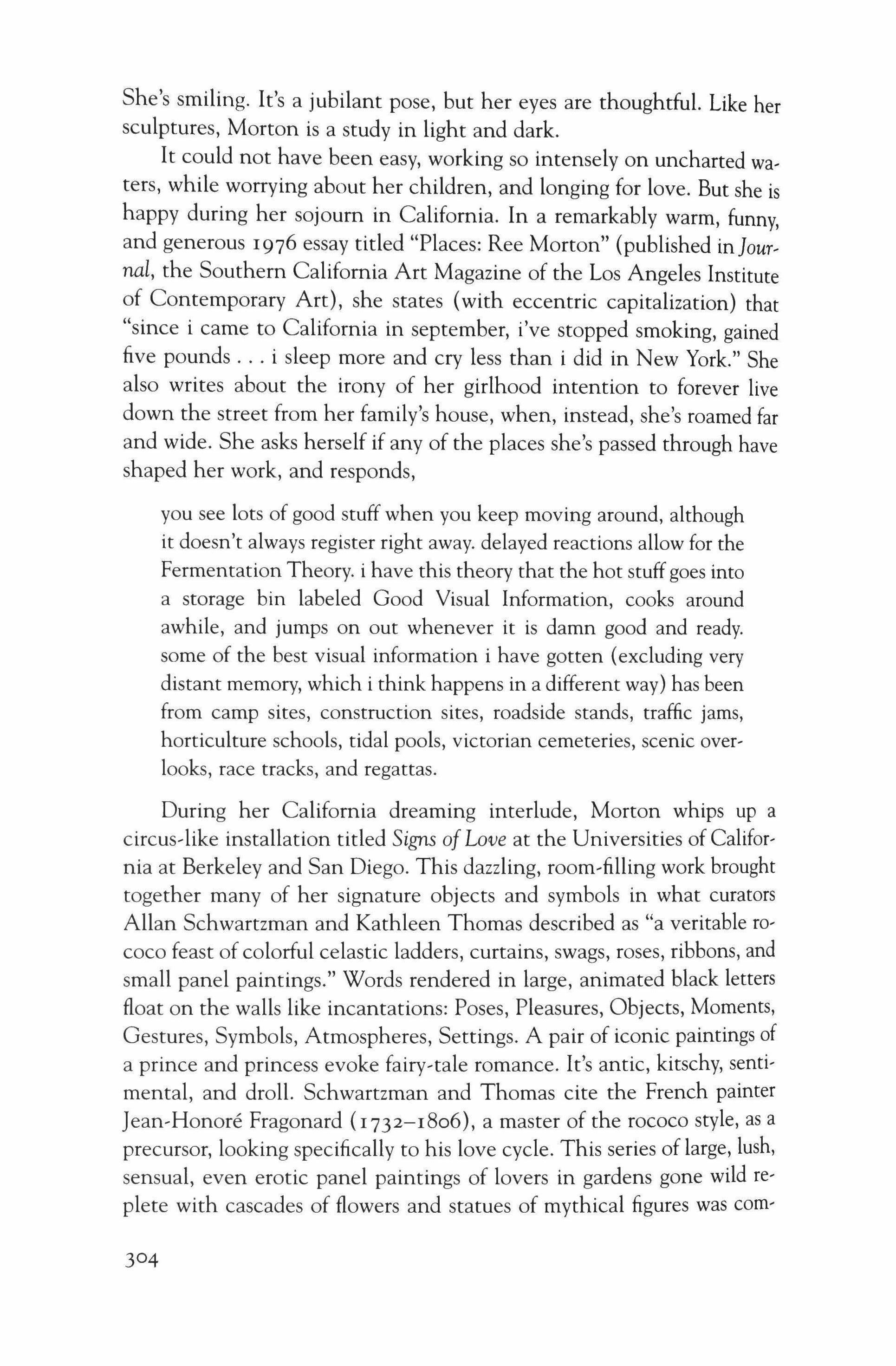
She's smiling. It's a jubilant pose, but her eyes are thoughtful. Like her sculptures, Morton is a study in light and dark. It could not have been easy, working so intensely on uncharted waters, while worrying about her children, and longing for love. But she is happy during her sojourn in California. In a remarkably warm, funny, and generous 1976 essay titled "Places: Ree Morton" (published in}ournal, the Southern California Art Magazine of the Los Angeles Institute of Contemporary Art), she states (with eccentric capitalization) that "since i came to California in september, i've stopped smoking, gained five pounds i sleep more and cry less than i did in New York." She also writes about the irony of her girlhood intention to forever live down the street from her family's house, when, instead, she's roamed far and wide. She asks herself if any of the places she's passed through have shaped her work, and responds,
you see lots of good stuff when you keep moving around, although it doesn't always register right away. delayed reactions allow for the Fermentation Theory. i have this theory that the hot stuff goes into a storage bin labeled Good Visual Information, cooks around awhile, and jumps on out whenever it is damn good and ready. some of the best visual information i have gotten (excluding very distant memory, which i think happens in a different way) has been from camp sites, construction sites, roadside stands, traffic jams, horticulture schools, tidal pools, victorian cemeteries, scenic overlooks, race tracks, and regattas.
During her California dreaming interlude, Morton whips up a circus-like installation titled Signs of Love at the Universities of California at Berkeley and San Diego. This dazzling, room-filling work brought together many of her signature objects and symbols in what curators Allan Schwartzman and Kathleen Thomas described as "a veritable rococo feast of colorful celastic ladders, curtains, swags, roses, ribbons, and small panel paintings." Words rendered in large, animated black letters float on the walls like incantations: Poses, Pleasures, Objects, Moments, Gestures, Symbols, Atmospheres, Settings. A pair of iconic paintings of a prince and princess evoke fairy-tale romance. It's antic, kitschy, sentimental, and droll. Schwartzman and Thomas cite the French painter [ean-Honore Fragonard (1732-1806), a master of the rococo style, as a precursor, looking specifically to his love cycle. This series of large, lush, sensual, even erotic panel paintings of lovers in gardens gone wild replete with cascades of flowers and statues of mythical figures was com-
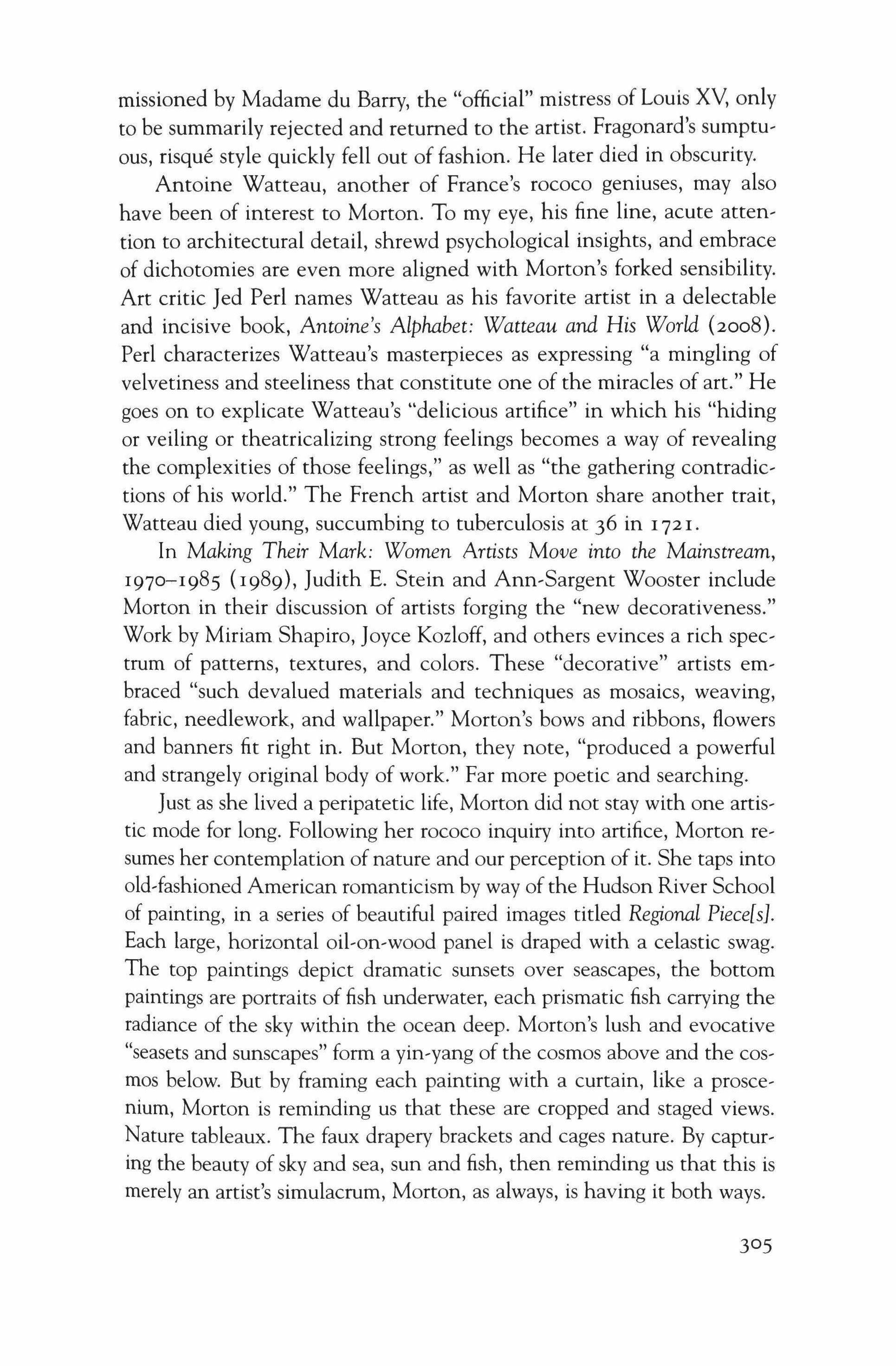
missioned by Madame du Barry, the "official" mistress of Louis XV, only to be summarily rejected and returned to the artist. Fragonard's sumptuous, risque style quickly fell out of fashion. He later died in obscurity.
Antoine Watteau, another of France's rococo geniuses, may also have been of interest to Morton. To my eye, his fine line, acute attention to architectural detail, shrewd psychological insights, and embrace of dichotomies are even more aligned with Morton's forked sensibility. Art critic Jed Perl names Watteau as his favorite artist in a delectable and incisive book, Antoine's Alphabet: Watteau and His World (2008). Perl characterizes Watteau's masterpieces as expressing "a mingling of velvetiness and steeliness that constitute one of the miracles of art." He goes on to explicate Watteau's "delicious artifice" in which his "hiding or veiling or theatricalizing strong feelings becomes a way of revealing the complexities of those feelings," as well as "the gathering contradictions of his world." The French artist and Morton share another trait, Watteau died young, succumbing to tuberculosis at 36 in 1721.
In Making Their Mark: Women Artists Move into the Mainstream, 197°-1985 (1989), Judith E. Stein and Ann-Sargent Wooster include Morton in their discussion of artists forging the "new decorativeness." Work by Miriam Shapiro, Joyce Kozloff, and others evinces a rich spectrum of patterns, textures, and colors. These "decorative" artists embraced "such devalued materials and techniques as mosaics, weaving, fabric, needlework, and wallpaper." Morton's bows and ribbons, flowers and banners fit right in. But Morton, they note, "produced a powerful and strangely original body of work." Far more poetic and searching.
Just as she lived a peripatetic life, Morton did not stay with one artistic mode for long. Following her rococo inquiry into artifice, Morton resumes her contemplation of nature and our perception of it. She taps into old-fashioned American romanticism by way of the Hudson River School of painting, in a series of beautiful paired images titled Regional Piece[s). Each large, horizontal oil-on-wood panel is draped with a celastic swag. The top paintings depict dramatic sunsets over seascapes, the bottom paintings are portraits of fish underwater, each prismatic fish carrying the radiance of the sky within the ocean deep. Morton's lush and evocative "seasets and sunscapes" form a yin-yang of the cosmos above and the cosmos below. But by framing each painting with a curtain, like a proscenium, Morton is reminding us that these are cropped and staged views. Nature tableaux. The faux drapery brackets and cages nature. By capturing the beauty of sky and sea, sun and fish, then reminding us that this is merely an artist's simulacrum, Morton, as always, is having it both ways.
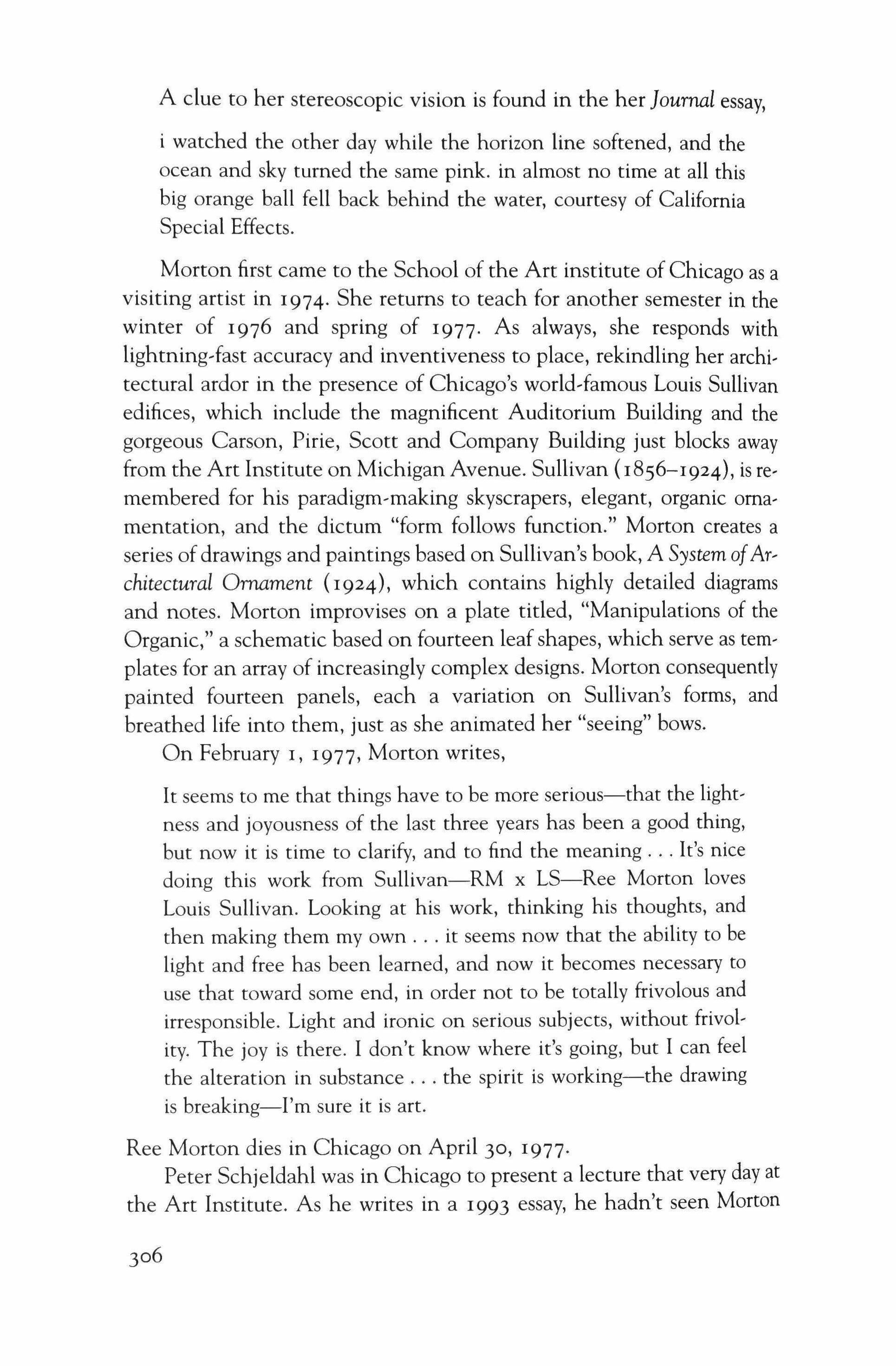
A clue to her stereoscopic vision is found in the her Journal essay, i watched the other day while the horizon line softened, and the ocean and sky turned the same pink. in almost no time at all this big orange ball fell back behind the water, courtesy of California Special Effects.
Morton first came to the School of the Art institute of Chicago as a visiting artist in 1974. She returns to teach for another semester in the winter of 1976 and spring of 1977. As always, she responds with lightning-fast accuracy and inventiveness to place, rekindling her architectural ardor in the presence of Chicago's world-famous Louis Sullivan edifices, which include the magnificent Auditorium Building and the gorgeous Carson, Pirie, Scott and Company Building just blocks away from the Art Institute on Michigan Avenue. Sullivan (1856-1924), is remembered for his paradigm-making skyscrapers, elegant, organic ornamentation, and the dictum "form follows function." Morton creates a series ofdrawings and paintings based on Sullivan's book, A System ofArchitectural Ornament (1924), which contains highly detailed diagrams and notes. Morton improvises on a plate titled, "Manipulations of the Organic," a schematic based on fourteen leaf shapes, which serve as templates for an array of increasingly complex designs. Morton consequently painted fourteen panels, each a variation on Sullivan's forms, and breathed life into them, just as she animated her "seeing" bows.
On February I, 1977, Morton writes,
It seems to me that things have to be more serious-that the lightness and joyousness of the last three years has been a good thing, but now it is time to clarify, and to find the meaning It's nice doing this work from Sullivan-RM x LS-Ree Morton loves Louis Sullivan. Looking at his work, thinking his thoughts, and then making them my own it seems now that the ability to be light and free has been learned, and now it becomes necessary to use that toward some end, in order not to be totally frivolous and irresponsible. Light and ironic on serious subjects, without frivolity. The joy is there. I don't know where it's going, but I can feel the alteration in substance the spirit is working-the drawing is breaking-I'm sure it is art.
Ree Morton dies in Chicago on April 30, 1977·
Peter Schjeldahl was in Chicago to present a lecture that very day at the Art Institute. As he writes in a 1993 essay, he hadn't seen Morton
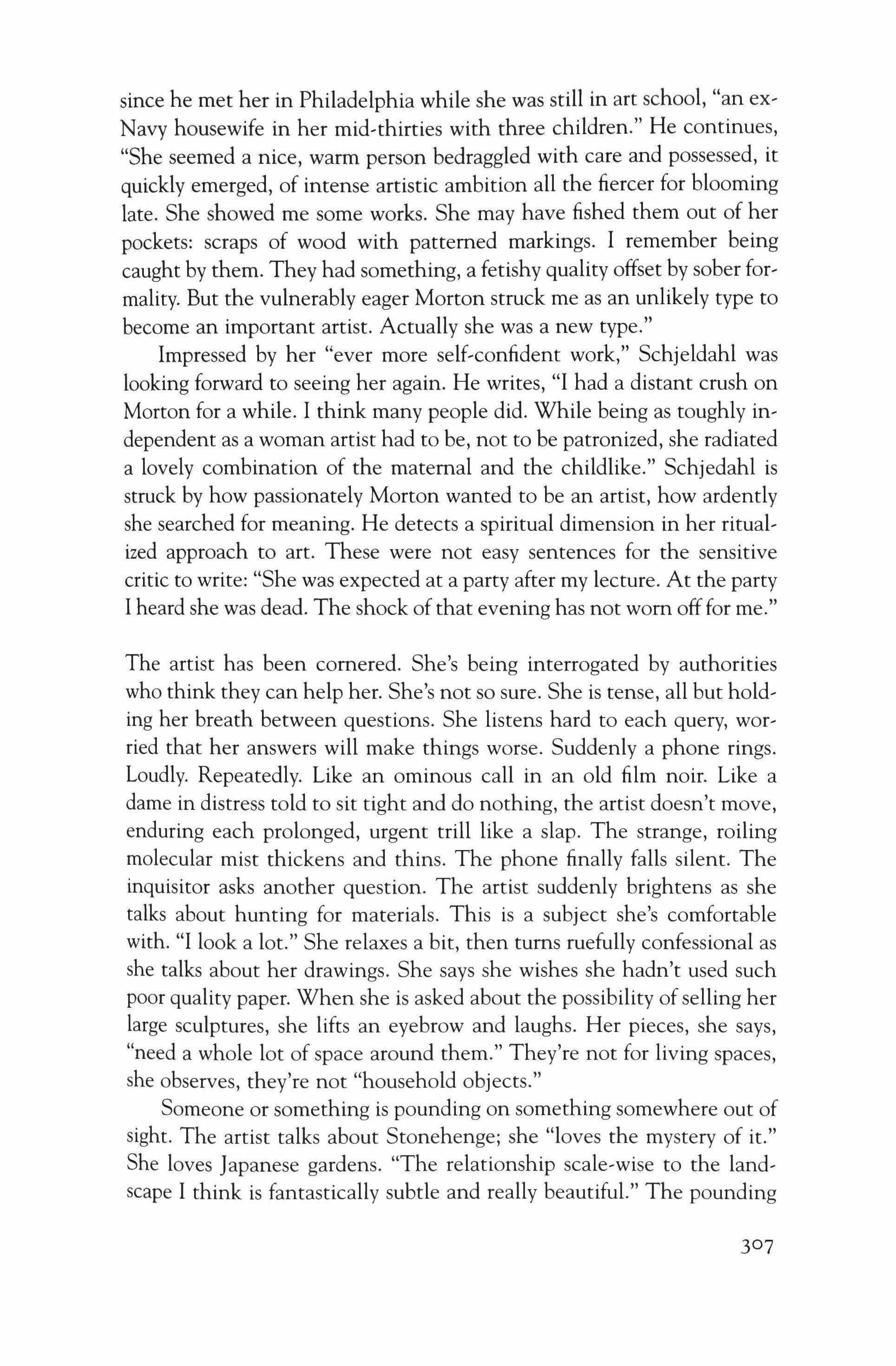
since he met her in Philadelphia while she was still in art school, "an ex, Navy housewife in her mid,thirties with three children." He continues, "She seemed a nice, warm person bedraggled with care and possessed, it quickly emerged, of intense artistic ambition all the fiercer for blooming late. She showed me some works. She may have fished them out of her pockets: scraps of wood with patterned markings. I remember being caught by them. They had something, a fetishy quality offset by sober for, mality. But the vulnerably eager Morton struck me as an unlikely type to become an important artist. Actually she was a new type."
Impressed by her "ever more self-confident work," Schjeldahl was looking forward to seeing her again. He writes, "I had a distant crush on Morton for a while. I think many people did. While being as toughly in' dependent as a woman artist had to be, not to be patronized, she radiated a lovely combination of the maternal and the childlike." Schjedahl is struck by how passionately Morton wanted to be an artist, how ardently she searched for meaning. He detects a spiritual dimension in her ritual, ized approach to art. These were not easy sentences for the sensitive critic to write: "She was expected at a party after my lecture. At the party I heard she was dead. The shock of that evening has not worn offfor me."
The artist has been cornered. She's being interrogated by authorities who think they can help her. She's not so sure. She is tense, all but hold, ing her breath between questions. She listens hard to each query, worried that her answers will make things worse. Suddenly a phone rings. Loudly. Repeatedly. Like an ominous call in an old film noir. Like a dame in distress told to sit tight and do nothing, the artist doesn't move, enduring each prolonged, urgent trill like a slap. The strange, roiling molecular mist thickens and thins. The phone finally falls silent. The inquisitor asks another question. The artist suddenly brightens as she talks about hunting for materials. This is a subject she's comfortable with. "I look a lot." She relaxes a bit, then turns ruefully confessional as she talks about her drawings. She says she wishes she hadn't used such poor quality paper. When she is asked about the possibility of selling her large sculptures, she lifts an eyebrow and laughs. Her pieces, she says, "need a whole lot of space around them." They're not for living spaces, she observes, they're not "household objects."
Someone or something is pounding on something somewhere out of sight. The artist talks about Stonehenge; she "loves the mystery of it." She loves Japanese gardens. "The relationship scale-wise to the land, scape I think is fantastically subtle and really beautiful." The pounding
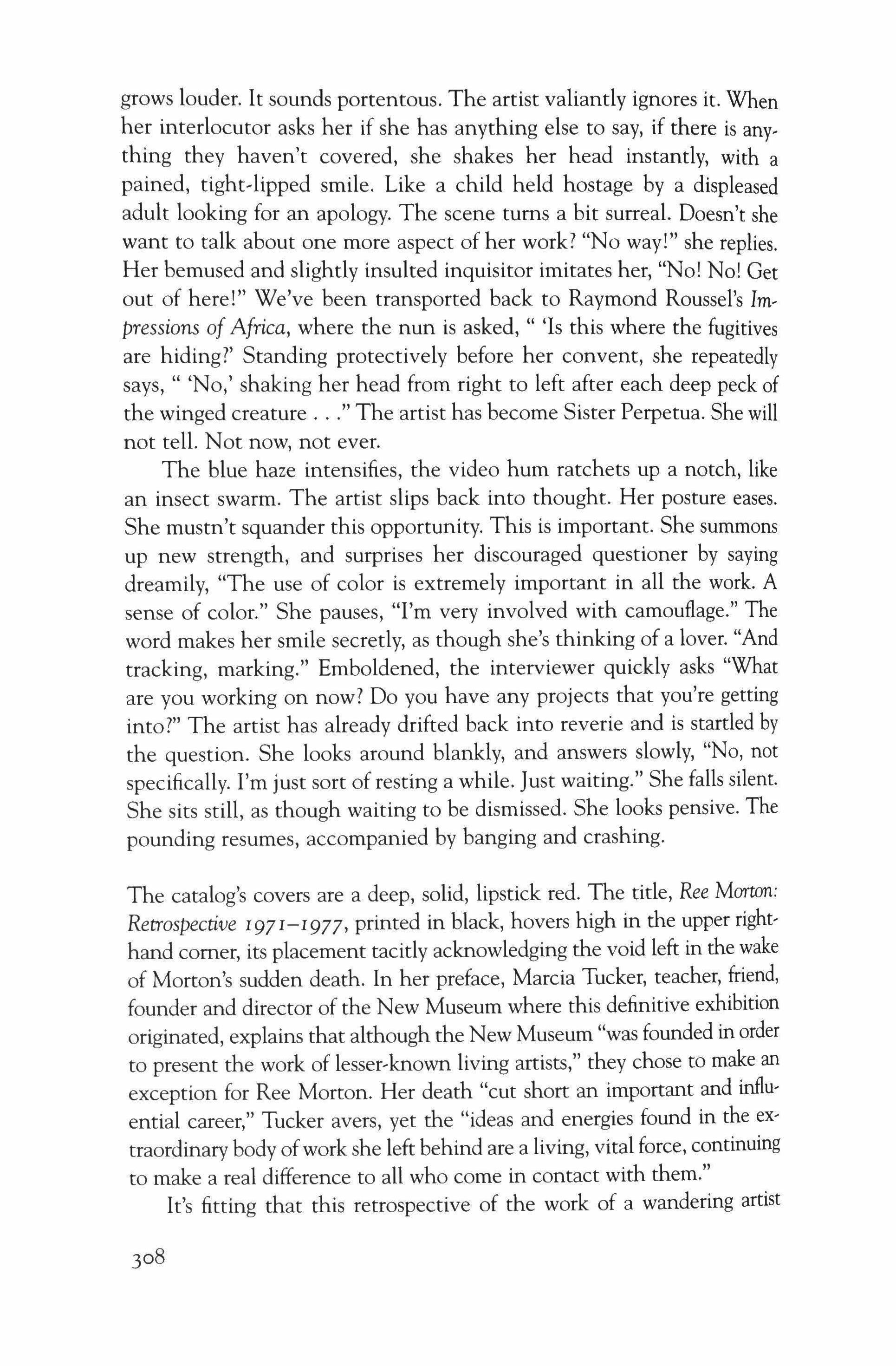
grows louder. It sounds portentous. The artist valiantly ignores it. When her interlocutor asks her if she has anything else to say, if there is anything they haven't covered, she shakes her head instantly, with a pained, tight-lipped smile. Like a child held hostage by a displeased adult looking for an apology. The scene turns a bit surreal. Doesn't she want to talk about one more aspect of her work? "No way!" she replies. Her bemused and slightly insulted inquisitor imitates her, "No! No! Get out of here!" We've been transported back to Raymond Roussel's Impressions ofAfrica, where the nun is asked, 'Is this where the fugitives are hiding?' Standing protectively before her convent, she repeatedly says, 'No,' shaking her head from right to left after each deep peck of the winged creature The artist has become Sister Perpetua. She will not tell. Not now, not ever.
The blue haze intensifies, the video hum ratchets up a notch, like an insect swarm. The artist slips back into thought. Her posture eases. She mustn't squander this opportunity. This is important. She summons up new strength, and surprises her discouraged questioner by saying dreamily, "The use of color is extremely important in all the work. A sense of color." She pauses, "I'm very involved with camouflage." The word makes her smile secretly, as though she's thinking of a lover. "And tracking, marking." Emboldened, the interviewer quickly asks "What are you working on now? Do you have any projects that you're getting into?" The artist has already drifted back into reverie and is startled by the question. She looks around blankly, and answers slowly, "No, not specifically. I'm just sort of resting a while. Just waiting." She falls silent. She sits still, as though waiting to be dismissed. She looks pensive. The pounding resumes, accompanied by banging and crashing.
The catalog's covers are a deep, solid, lipstick red. The title, Ree Morton: Retrospective I97I-I977, printed in black, hovers high in the upper righthand comer, its placement tacitly acknowledging the void left in the wake of Morton's sudden death. In her preface, Marcia Tucker, teacher, friend, founder and director of the New Museum where this definitive exhibition originated, explains that although the New Museum "was founded in order to present the work of lesser-known living artists," they chose to make an exception for Ree Morton. Her death "cut short an important and influential career," Tucker avers, yet the "ideas and energies found in the extraordinarybody ofwork she left behind are a living, vital force, continuing to make a real difference to all who come in contact with them."
It's fitting that this retrospective of the work of a wandering artist
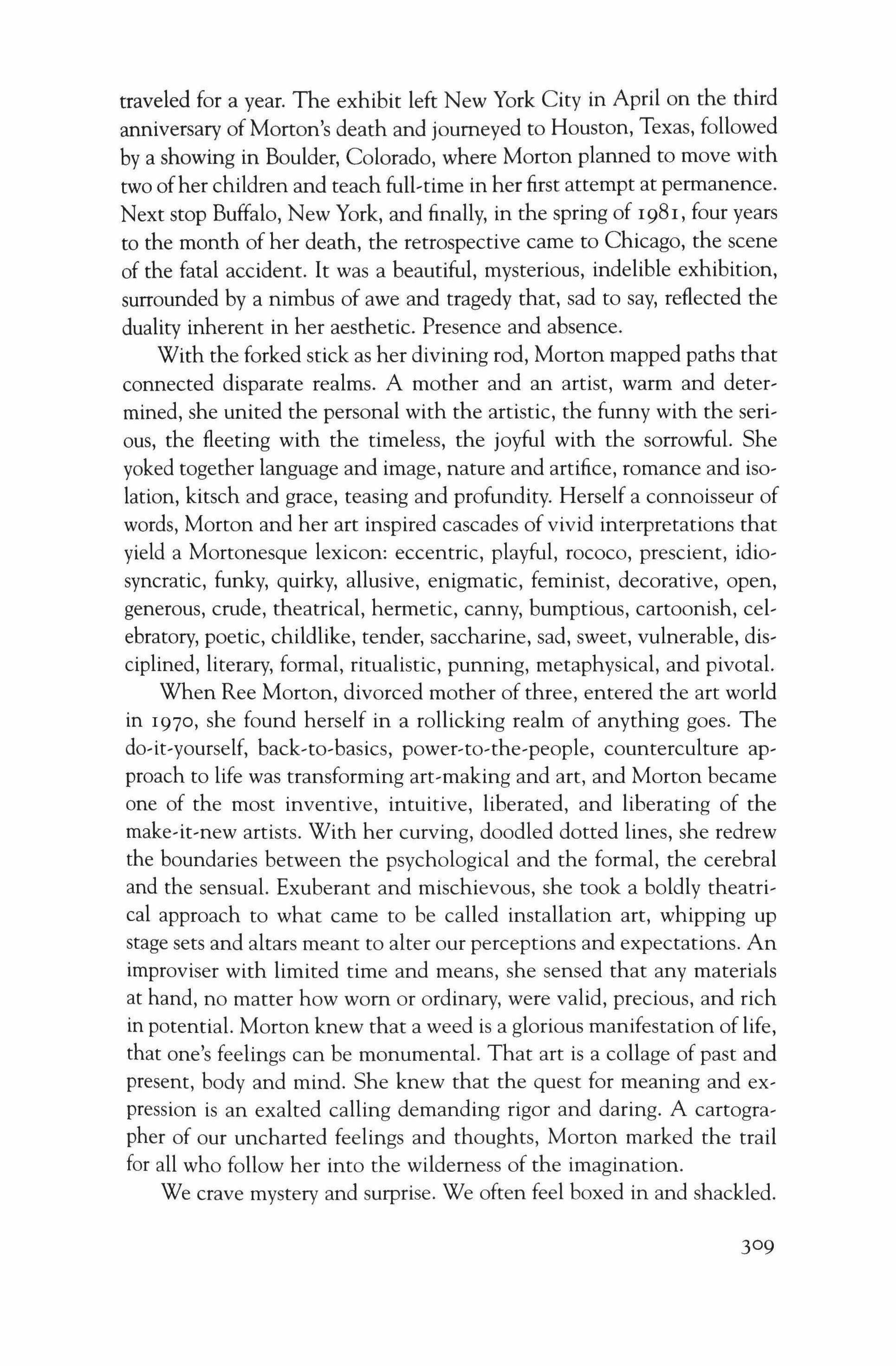
traveled for a year. The exhibit left New York City in April on the third anniversary of Morton's death and journeyed to Houston, Texas, followed by a showing in Boulder, Colorado, where Morton planned to move with two ofher children and teach full-time in her first attempt at permanence. Next stop Buffalo, New York, and finally, in the spring of I98I, four years to the month of her death, the retrospective came to Chicago, the scene of the fatal accident. It was a beautiful, mysterious, indelible exhibition, surrounded by a nimbus of awe and tragedy that, sad to say, reflected the duality inherent in her aesthetic. Presence and absence.
With the forked stick as her divining rod, Morton mapped paths that connected disparate realms. A mother and an artist, warm and determined, she united the personal with the artistic, the funny with the serious, the fleeting with the timeless, the joyful with the sorrowful. She yoked together language and image, nature and artifice, romance and isolation, kitsch and grace, teasing and profundity. Herself a connoisseur of words, Morton and her art inspired cascades of vivid interpretations that yield a Mortonesque lexicon: eccentric, playful, rococo, prescient, idiosyncratic, funky, quirky, allusive, enigmatic, feminist, decorative, open, generous, crude, theatrical, hermetic, canny, bumptious, cartoonish, eelebratory, poetic, childlike, tender, saccharine, sad, sweet, vulnerable, disciplined, literary, formal, ritualistic, punning, metaphysical, and pivotal.
When Ree Morton, divorced mother of three, entered the art world in I970, she found herself in a rollicking realm of anything goes. The do-it-yourself back-to-basics, power-to-the-people, counterculture approach to life was transforming art-making and art, and Morton became one of the most inventive, intuitive, liberated, and liberating of the make-it-new artists. With her curving, doodled dotted lines, she redrew the boundaries between the psychological and the formal, the cerebral and the sensual. Exuberant and mischievous, she took a boldly theatrical approach to what came to be called installation art, whipping up stage sets and altars meant to alter our perceptions and expectations. An improviser with limited time and means, she sensed that any materials at hand, no matter how worn or ordinary, were valid, precious, and rich in potential. Morton knew that a weed is a glorious manifestation of life, that one's feelings can be monumental. That art is a collage of past and present, body and mind. She knew that the quest for meaning and ex� pression is an exalted calling demanding rigor and daring. A cartographer of our uncharted feelings and thoughts, Morton marked the trail for all who follow her into the wilderness of the imagination. We crave mystery and surprise. We often feel boxed in and shackled.
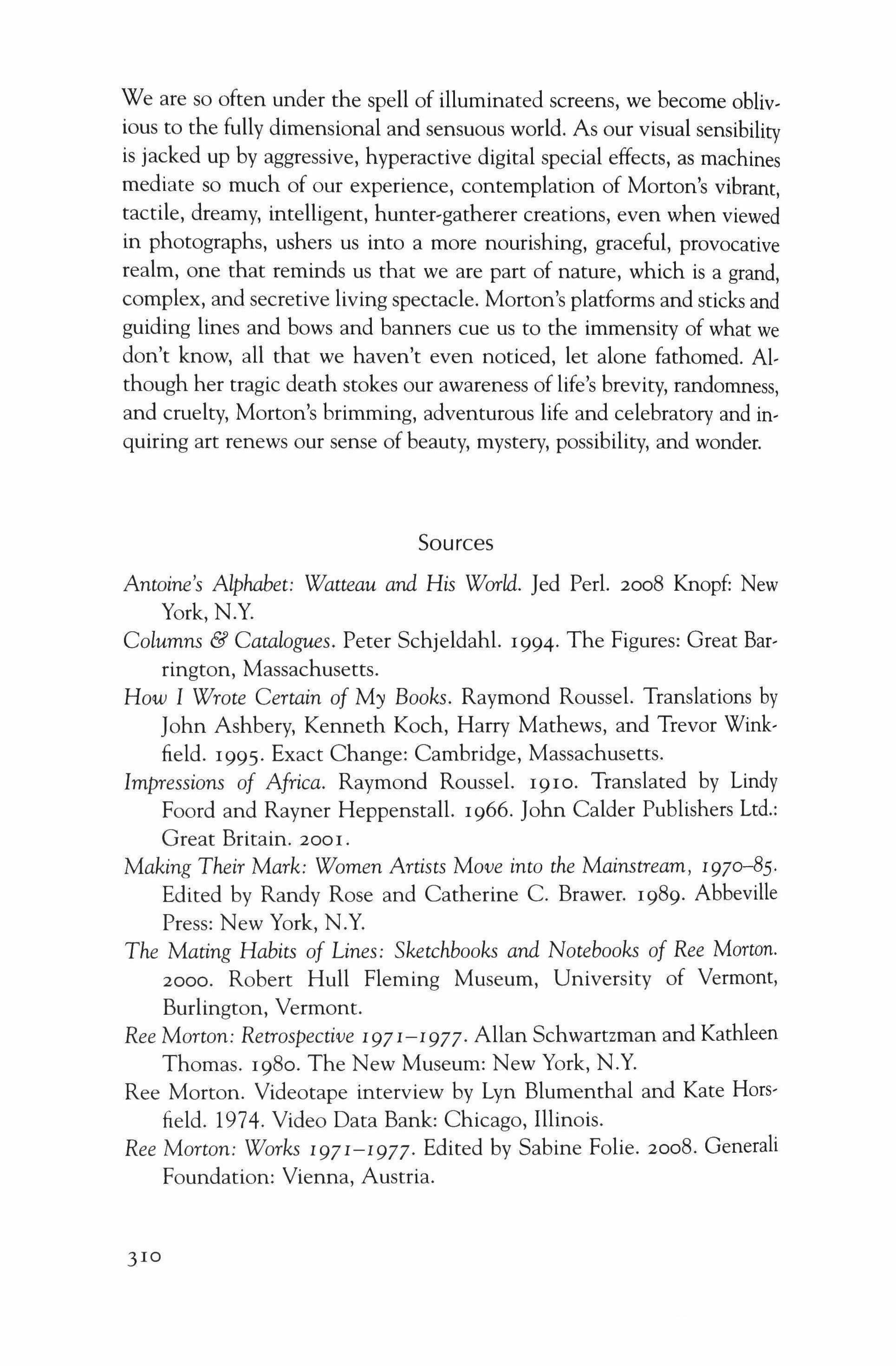
We are so often under the spell of illuminated screens, we become oblivious to the fully dimensional and sensuous world. As our visual sensibility is jacked up by aggressive, hyperactive digital special effects, as machines mediate so much of our experience, contemplation of Morton's vibrant, tactile, dreamy, intelligent, hunter-gatherer creations, even when viewed in photographs, ushers us into a more nourishing, graceful, provocative realm, one that reminds us that we are part of nature, which is a grand, complex, and secretive living spectacle. Morton's platforms and sticks and guiding lines and bows and banners cue us to the immensity of what we don't know, all that we haven't even noticed, let alone fathomed. Although her tragic death stokes our awareness of life's brevity, randomness, and cruelty, Morton's brimming, adventurous life and celebratory and inquiring art renews our sense of beauty, mystery, possibility, and wonder.
Sources
Antoine's Alphabet: Watteau and His Warld. Jed Perl. 2008 Knopf: New York, N.Y.
Columns & Catalogues. Peter Schjeldahl. 1994. The Figures: Great Barrington, Massachusetts.
How I Wrote Certain of My Books. Raymond Roussel. Translations by John Ashbery, Kenneth Koch, Harry Mathews, and Trevor Winkfield. 1995. Exact Change: Cambridge, Massachusetts. Impressions of Africa. Raymond Roussel. 1910. Translated by Lindy Foard and Rayner Heppenstall. 1966. John Calder Publishers Ltd.: Great Britain. 2001.
Making Their Mark: Women Artists Move into the Mainstream, 1970-85· Edited by Randy Rose and Catherine C. Brawer. 1989. Abbeville Press: New York, N.Y.
The Mating Habits of Lines: Sketchbooks and Notebooks of Ree Morton. 2000. Robert Hull Fleming Museum, University of Vermont, Burlington, Vermont.
Ree Morton: Retrospective 1971-1977. Allan Schwartzman and Kathleen Thomas. 1980. The New Museum: New York, N.Y.
Ree Morton. Videotape interview by Lyn Blumenthal and Kate Horsfield. 1974. Video Data Bank: Chicago, Illinois.
Ree Morton: Works 1971-1977. Edited by Sabine Folie. 2008. Generali Foundation: Vienna, Austria.
310
Elizabeth Kadetsky
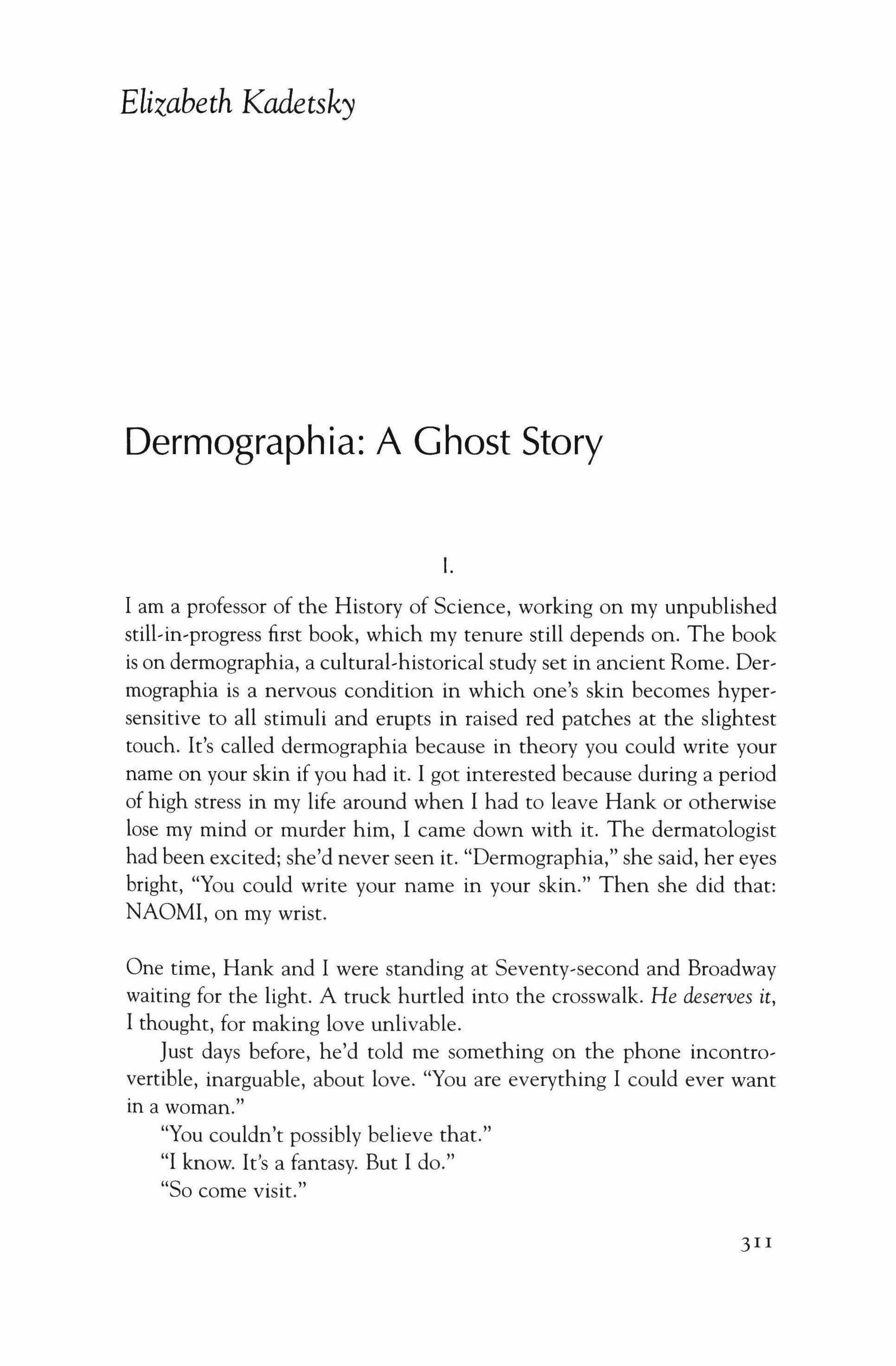
Dermographia: A Ghost Story
I am a professor of the History of Science, working on my unpublished still-in-progress first book, which my tenure still depends on. The book is on dermographia, a cultural-historical study set in ancient Rome. Dermographia is a nervous condition in which one's skin becomes hypersensitive to all stimuli and erupts in raised red patches at the slightest touch. It's called dermographia because in theory you could write your name on your skin if you had it. I got interested because during a period of high stress in my life around when I had to leave Hank or otherwise lose my mind or murder him, I came down with it. The dermatologist had been excited; she'd never seen it. "Dermographia," she said, her eyes bright, "You could write your name in your skin." Then she did that: NAOMI, on my wrist.
One time, Hank and I were standing at Seventy-second and Broadway waiting for the light. A truck hurtled into the crosswalk. He deserves it, I thought, for making love unlivable.
Just days before, he'd told me something on the phone incontrovertible, inarguable, about love. "You are everything I could ever want in a woman."
"You couldn't possibly believe that."
"I know. It's a fantasy. But I do."
"So come visit."
I.
3II
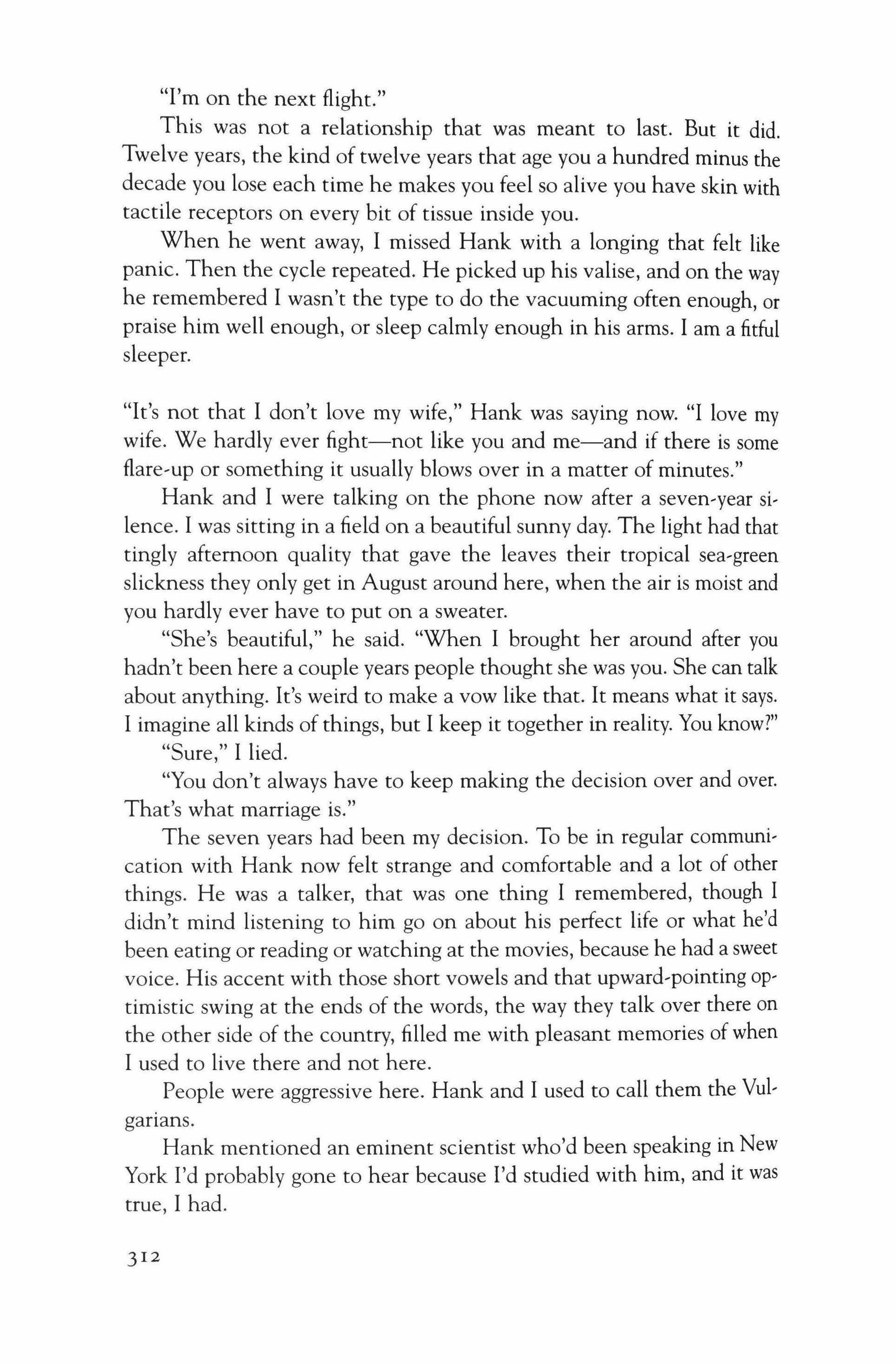
"I'm on the next flight."
This was not a relationship that was meant to last. But it did. Twelve years, the kind of twelve years that age you a hundred minus the decade you lose each time he makes you feel so alive you have skin with tactile receptors on every bit of tissue inside you.
When he went away, I missed Hank with a longing that felt like panic. Then the cycle repeated. He picked up his valise, and on the way he remembered I wasn't the type to do the vacuuming often enough, or praise him well enough, or sleep calmly enough in his arms. I am a fitful sleeper.
"It's not that I don't love my wife," Hank was saying now. "I love my wife. We hardly ever fight-not like you and me-and if there is some flare-up or something it usually blows over in a matter of minutes."
Hank and I were talking on the phone now after a seven-year silence. I was sitting in a field on a beautiful sunny day. The light had that tingly afternoon quality that gave the leaves their tropical sea-green slickness they only get in August around here, when the air is moist and you hardly ever have to put on a sweater.
"She's beautiful," he said. "When I brought her around after you hadn't been here a couple years people thought she was you. She can talk about anything. It's weird to make a vow like that. It means what it says. I imagine all kinds of things, but I keep it together in reality. You know?"
"Sure," I lied.
"You don't always have to keep making the decision over and over. That's what marriage is."
The seven years had been my decision. To be in regular communication with Hank now felt strange and comfortable and a lot of other things. He was a talker, that was one thing I remembered, though I didn't mind listening to him go on about his perfect life or what he'd been eating or reading or watching at the movies, because he had a sweet voice. His accent with those short vowels and that upward-pointing optimistic swing at the ends of the words, the way they talk over there on the other side of the country, filled me with pleasant memories of when I used to live there and not here.
People were aggressive here. Hank and I used to call them the Vulgarians.
Hank mentioned an eminent scientist who'd been speaking in New York I'd probably gone to hear because I'd studied with him, and it was true, I had.
312
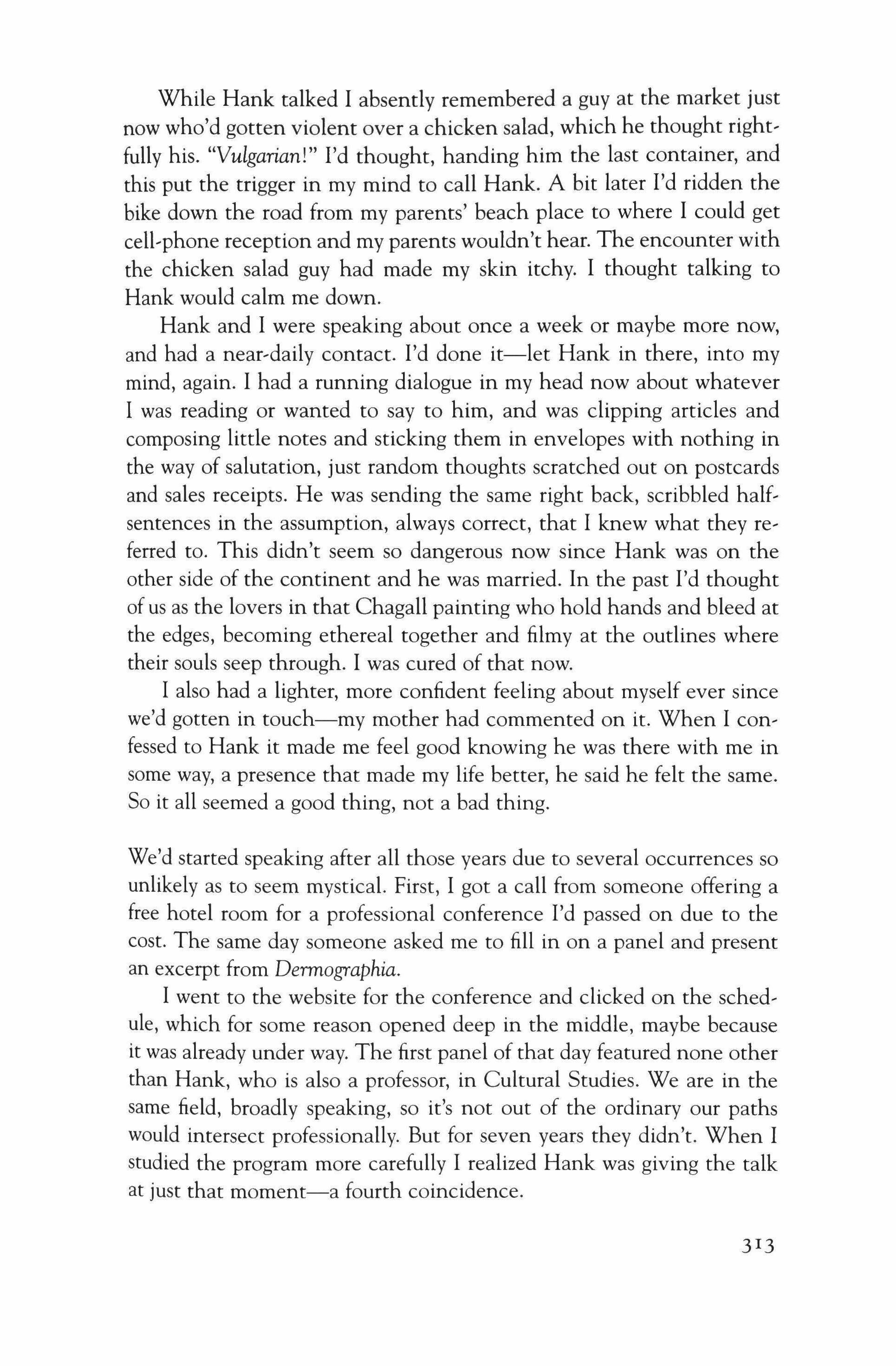
While Hank talked I absently remembered a guy at the market just now who'd gotten violent over a chicken salad, which he thought rightfully his. "Vulgarian!" I'd thought, handing him the last container, and this put the trigger in my mind to call Hank. A bit later I'd ridden the bike down the road from my parents' beach place to where I could get cell-phone reception and my parents wouldn't hear. The encounter with the chicken salad guy had made my skin itchy. I thought talking to Hank would calm me down.
Hank and I were speaking about once a week or maybe more now, and had a near-daily contact. I'd done it-let Hank in there, into my mind, again. I had a running dialogue in my head now about whatever I was reading or wanted to say to him, and was clipping articles and composing little notes and sticking them in envelopes with nothing in the way of salutation, just random thoughts scratched out on postcards and sales receipts. He was sending the same right back, scribbled halfsentences in the assumption, always correct, that I knew what they referred to. This didn't seem so dangerous now since Hank was on the other side of the continent and he was married. In the past I'd thought of us as the lovers in that Chagall painting who hold hands and bleed at the edges, becoming ethereal together and filmy at the outlines where their souls seep through. I was cured of that now.
I also had a lighter, more confident feeling about myself ever since we'd gotten in touch-my mother had commented on it. When I confessed to Hank it made me feel good knowing he was there with me in some way, a presence that made my life better, he said he felt the same. So it all seemed a good thing, not a bad thing.
We'd started speaking after all those years due to several occurrences so unlikely as to seem mystical. First, I got a call from someone offering a free hotel room for a professional conference I'd passed on due to the cost. The same day someone asked me to fill in on a panel and present an excerpt from Dermographia.
I went to the website for the conference and clicked on the schedule, which for some reason opened deep in the middle, maybe because it was already under way. The first panel of that day featured none other than Hank, who is also a professor, in Cultural Studies. We are in the same field, broadly speaking, so it's not out of the ordinary our paths would intersect professionally. But for seven years they didn't. When I studied the program more carefully I realized Hank was giving the talk at just that moment-a fourth coincidence.
313
I called him at his home number, which I still had memorized, to leave a message warning him I'd see him tomorrow at the conference. His voice on the message sounded exactly the same, and so did the quality of his answering machine, so much that I suspected it was the same answering machine I'd given him a decade ago that was so old-fashioned you couldn't call in to retrieve messages. He a was a luddite like that. He'd been my professor, twenty years older. The only thing different about his message now was that everywhere it used to say "I" it now said "we," and it mentioned his wife, Althea.
If it was the same answering machine he wouldn't get the messagethe program revealed Althea was at the conference, too-so I Googled Hank and found his university email and sent off a note repeating the information in the phone message. I figured he'd never get either.
Come morning, an email from my father appeared, a forward from Hank sent a few hours before I'd called him-a fifth coincidence. He used to write letters to my parents asking after me, but I begged them to ignore him and he eventually stopped. They hadn't heard from him for about four years, ever since, as I'd heard through the grapevine, he'd gotten married.
This email came from a different address from the one I'd Googled-so maybe he wasn't still such a luddite. I re-sent the original. Within a matter of hours we were drinking a glass of wine together at the conference, and he was saying he was still in love with me even though he was married to Althea-who was socializing across the hotel lobby in her Corkies. And never mind, Hank had a happy marriage.
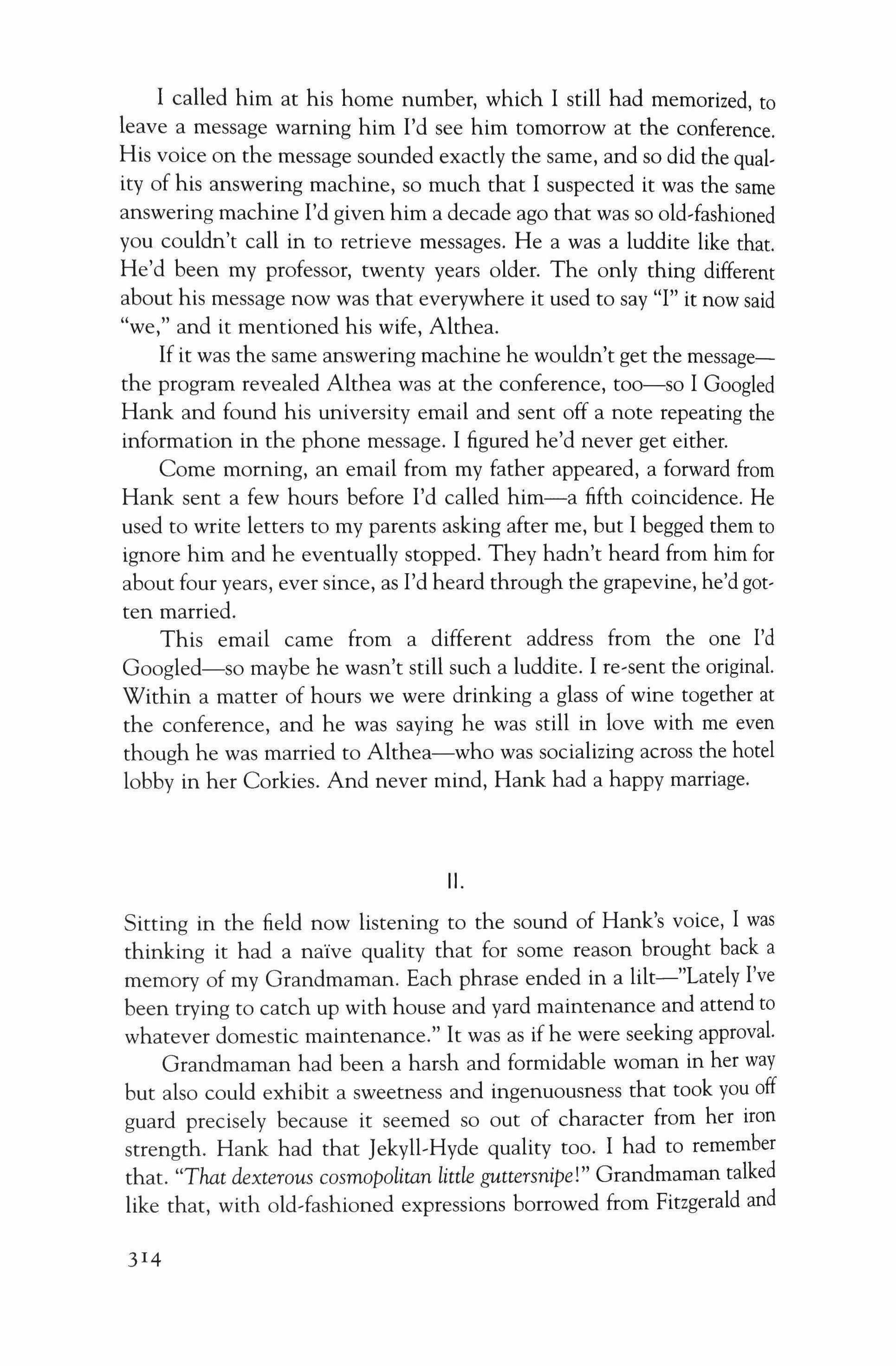
II.
Sitting in the field now listening to the sound of Hank's voice, I was thinking it had a narve quality that for some reason brought back a memory of my Grandmaman. Each phrase ended in a lilt-"Lately I've been trying to catch up with house and yard maintenance and attend to whatever domestic maintenance." It was as if he were seeking approval.
Grandmaman had been a harsh and formidable woman in her way but also could exhibit a sweetness and ingenuousness that took you off guard precisely because it seemed so out of character from her iron strength. Hank had that Jekyll-Hyde quality too. I had to remember that. "That dexterous cosmopolitan little guttersnipe!" Grandmaman talked like that, with old-fashioned expressions borrowed from Fitzgerald and
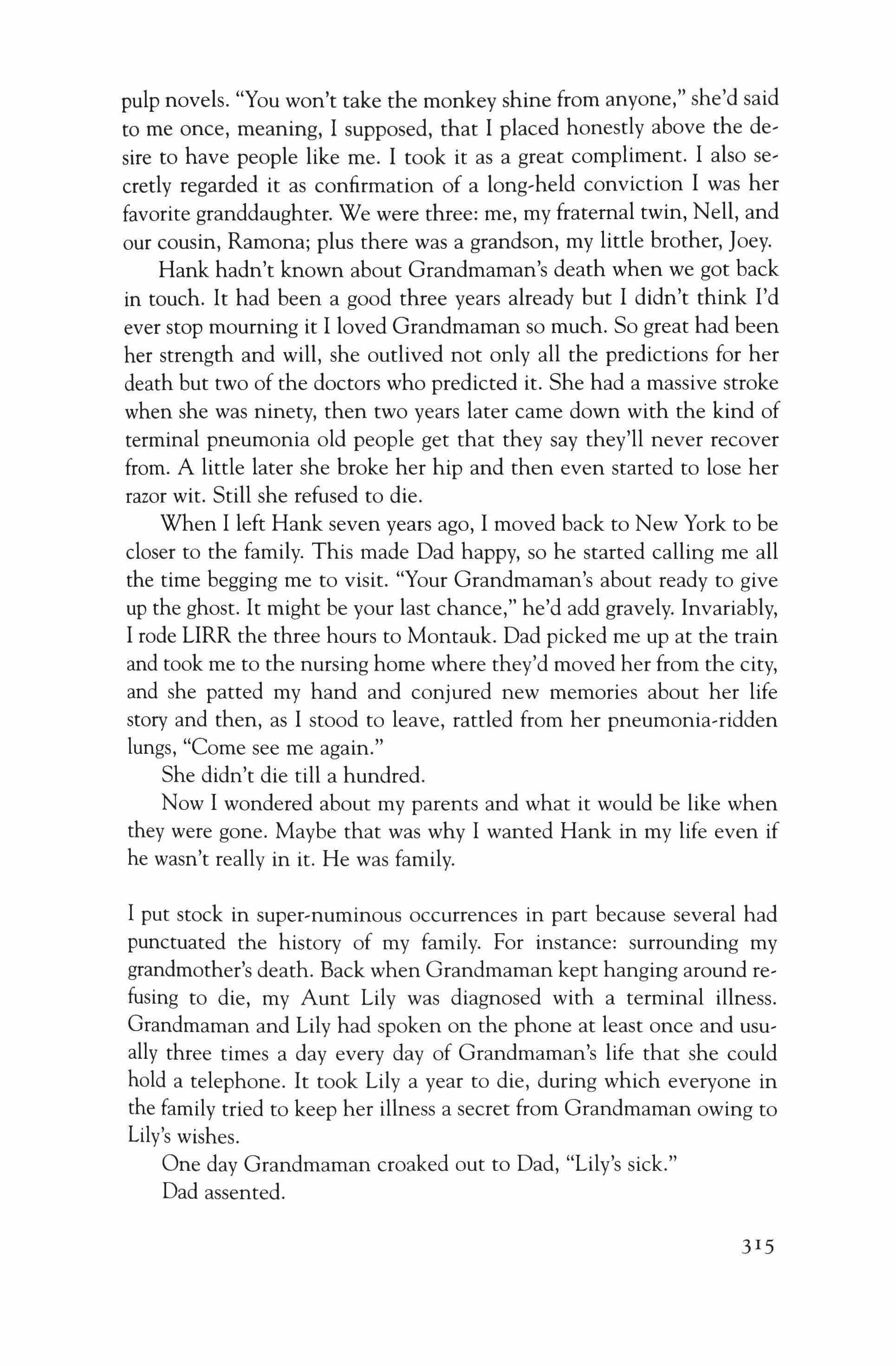
pulp novels. "You won't take the monkey shine from anyone," she'd said to me once, meaning, I supposed, that I placed honestly above the de' sire to have people like me. I took it as a great compliment. I also secretly regarded it as confirmation of a long'held conviction I was her favorite granddaughter. We were three: me, my fraternal twin, Nell, and our cousin, Ramona; plus there was a grandson, my little brother, Joey. Hank hadn't known about Grandmaman's death when we got back in touch. It had been a good three years already but I didn't think I'd ever stop mourning it I loved Grandmaman so much. So great had been her strength and will, she outlived not only all the predictions for her death but two of the doctors who predicted it. She had a massive stroke when she was ninety, then two years later came down with the kind of terminal pneumonia old people get that they say they'll never recover from. A little later she broke her hip and then even started to lose her razor wit. Still she refused to die.
When I left Hank seven years ago, I moved back to New York to be closer to the family. This made Dad happy, so he started calling me all the time begging me to visit. "Your Grandmaman's about ready to give up the ghost. It might be your last chance," he'd add gravely. Invariably, I rode LIRR the three hours to Montauk. Dad picked me up at the train and took me to the nursing home where they'd moved her from the city, and she patted my hand and conjured new memories about her life story and then, as I stood to leave, rattled from her pneumonia,ridden lungs, "Come see me again."
She didn't die till a hundred.
Now I wondered about my parents and what it would be like when they were gone. Maybe that was why I wanted Hank in my life even if he wasn't really in it. He was family.
I put stock in super-numinous occurrences in part because several had punctuated the history of my family. For instance: surrounding my grandmother's death. Back when Grandmaman kept hanging around refusing to die, my Aunt Lily was diagnosed with a terminal illness. Grandmaman and Lily had spoken on the phone at least once and usually three times a day every day of Grandmaman's life that she could hold a telephone. It took Lily a year to die, during which everyone in the family tried to keep her illness a secret from Grandmaman owing to Lily's wishes.
One day Grandmaman croaked out to Dad, "Lily's sick."
Dad assented.
"She's dying. What is it, pulmonary fibrosis?" she said, naming the very disease.
There was no explanation for how she knew about her daughter's condition, and knew so precisely. So secretive was Lily, few of us were aware Lily was dying and not just undergoing treatment. I went to see Lily after she told us about her one-week death sentence. She was a skeleton, aged twenty years over six months, now two days short of death. Propped up in her bed, her head tilting onto her shoulder from weakness, she looked as old and frail as Grandmaman in her own has, pital bed. There was a remarkable likeness down to the bones like that.
"It's strange isn't it," Lily confided to me, "my dying and my mother doesn't even know."
I didn't reveal she did know.
I went back home and spent two sleepless nights awaiting the phone call announcing Lily's death. The phone rang at midnight. It was Nell, and not my father as expected. "Grandmaman died," Nell informed me. Minutes later, I got the call about Lily.
Clearly my grandmother had wanted to die first-she'd been that way, after all, orderly and neat. But in fact as it turned out Lily's time of death had been minutes before Grandmaman's.
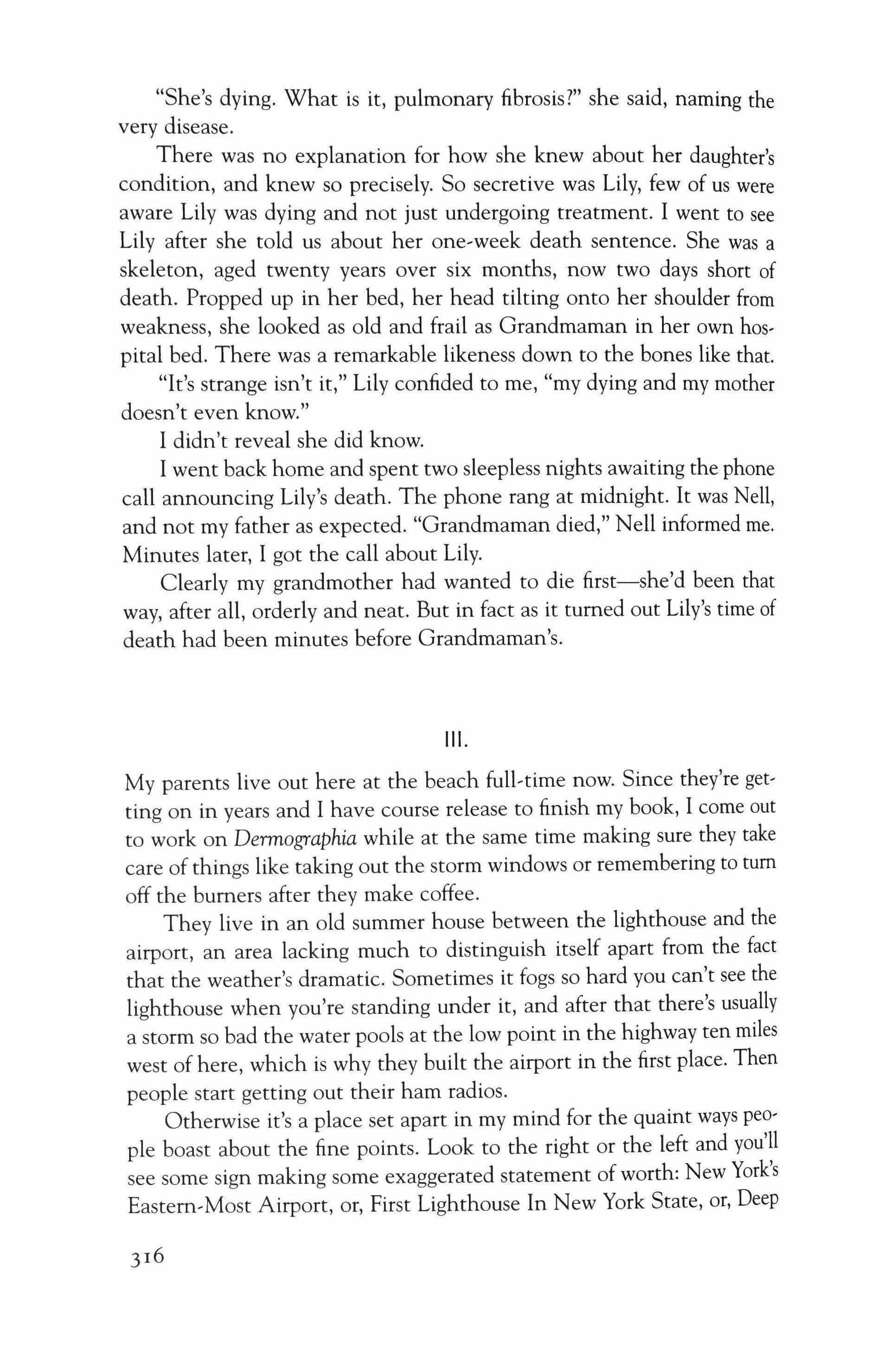
III.
My parents live out here at the beach full-time now. Since they're get' ting on in years and I have course release to finish my book, I come out to work on Dermographia while at the same time making sure they take care of things like taking out the storm windows or remembering to tum off the burners after they make coffee.
They live in an old summer house between the lighthouse and the airport, an area lacking much to distinguish itself apart from the fact that the weather's dramatic. Sometimes it fogs so hard you can't see the lighthouse when you're standing under it, and after that there's usually a storm so bad the water pools at the low point in the highway ten miles west of here, which is why they built the airport in the first place. Then people start getting out their ham radios.
Otherwise it's a place set apart in my mind for the quaint ways people boast about the fine points. Look to the right or the left and you'll see some sign making some exaggerated statement of worth: New York's Eastern-Most Airport, or, First Lighthouse In New York State, or, Deep
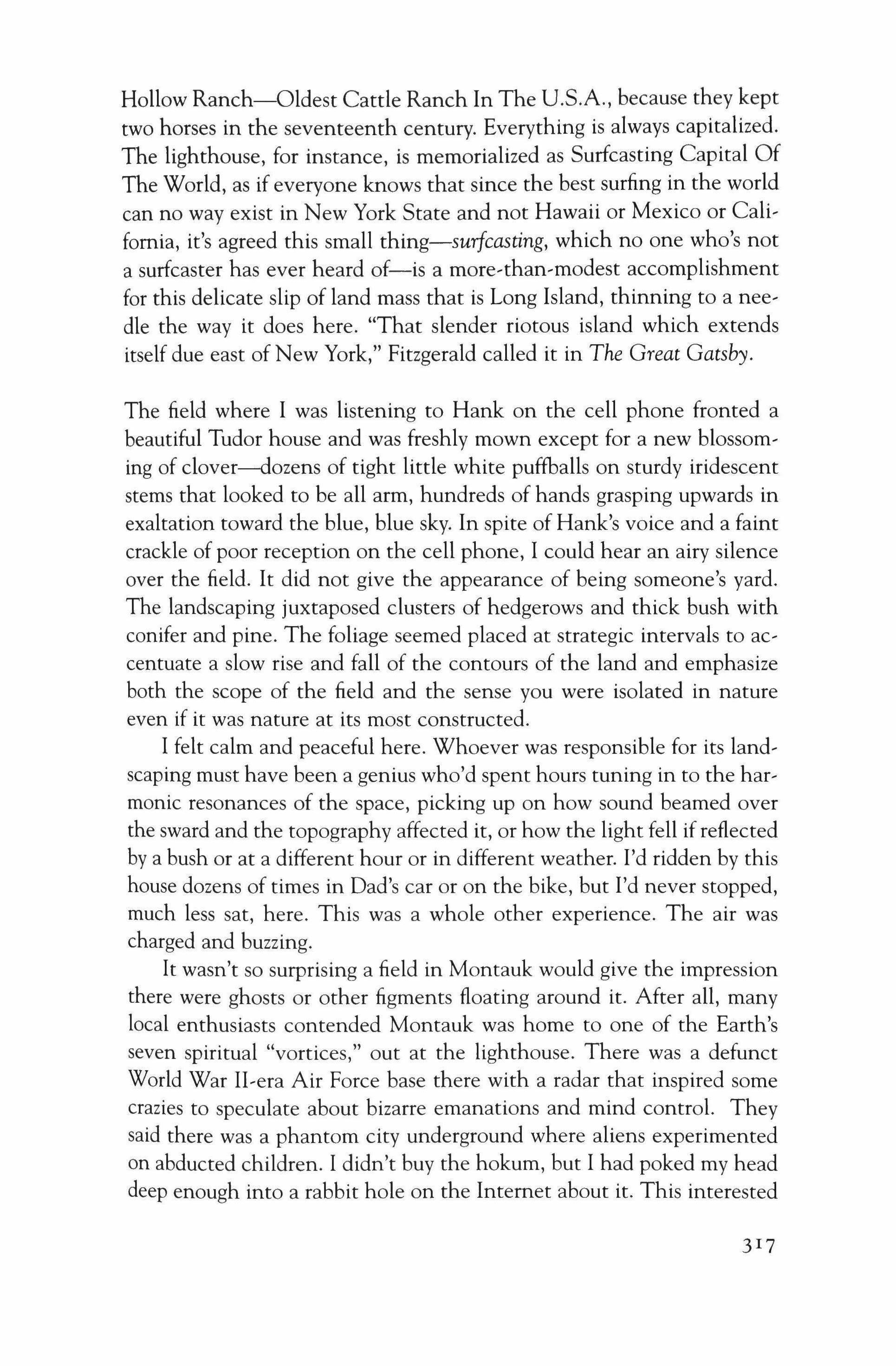
Hollow Ranch-Oldest Cattle Ranch In The U.S.A., because they kept two horses in the seventeenth century. Everything is always capitalized. The lighthouse, for instance, is memorialized as Surfcasting Capital Of The World, as if everyone knows that since the best surfing in the world can no way exist in New York State and not Hawaii or Mexico or Cali, fornia, it's agreed this small thing-sU1fcasting, which no one who's not a surfcaster has ever heard of-is a more'than,modest accomplishment for this delicate slip of land mass that is Long Island, thinning to a nee' dle the way it does here. "That slender riotous island which extends itself due east of New York," Fitzgerald called it in The Great Gatsby.
The field where I was listening to Hank on the cell phone fronted a beautiful Tudor house and was freshly mown except for a new blossom' ing of clover--dozens of tight little white puffballs on sturdy iridescent stems that looked to be all arm, hundreds of hands grasping upwards in exaltation toward the blue, blue sky. In spite of Hank's voice and a faint crackle of poor reception on the cell phone, I could hear an airy silence over the field. It did not give the appearance of being someone's yard. The landscaping juxtaposed clusters of hedgerows and thick bush with conifer and pine. The foliage seemed placed at strategic intervals to accentuate a slow rise and fall of the contours of the land and emphasize both the scope of the field and the sense you were isolated in nature even if it was nature at its most constructed.
I felt calm and peaceful here. Whoever was responsible for its land, scaping must have been a genius who'd spent hours tuning in to the harmonic resonances of the space, picking up on how sound beamed over the sward and the topography affected it, or how the light fell ifreflected by a bush or at a different hour or in different weather. I'd ridden by this house dozens of times in Dad's car or on the bike, but I'd never stopped, much less sat, here. This was a whole other experience. The air was charged and buzzing.
It wasn't so surprising a field in Montauk would give the impression there were ghosts or other figments floating around it. After all, many local enthusiasts contended Montauk was home to one of the Earth's seven spiritual "vortices," out at the lighthouse. There was a defunct World War Il-era Air Force base there with a radar that inspired some crazies to speculate about bizarre emanations and mind control. They said there was a phantom city underground where aliens experimented on abducted children. I didn't buy the hokum, but I had poked my head deep enough into a rabbit hole on the Internet about it. This interested
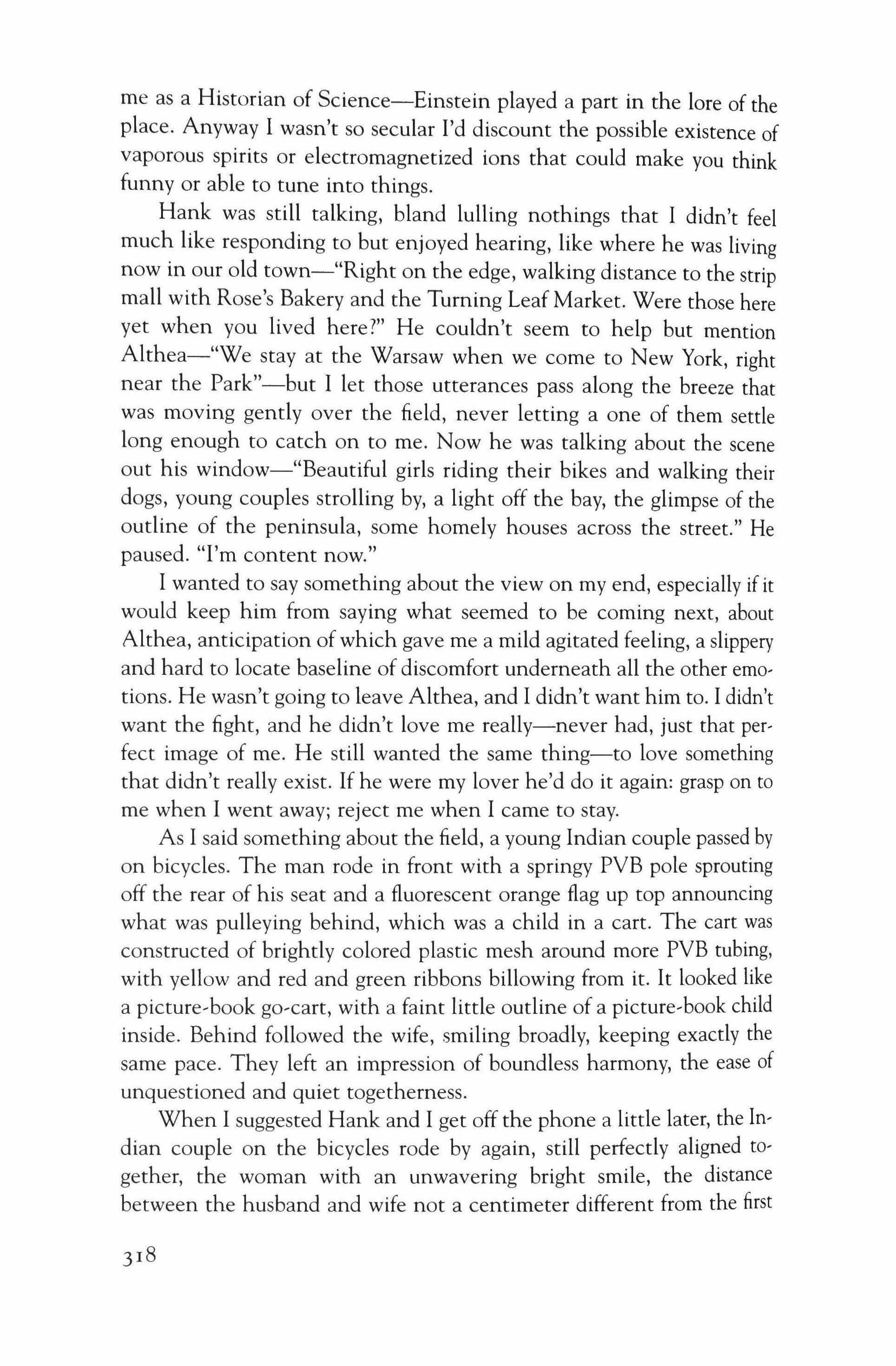
me as a Historian of Science-Einstein played a part in the lore of the place. Anyway I wasn't so secular I'd discount the possible existence of vaporous spirits or electromagnetized ions that could make you think funny or able to tune into things.
Hank was still talking, bland lulling nothings that I didn't feel much like responding to but enjoyed hearing, like where he was living now in our old town-"Right on the edge, walking distance to the strip mall with Rose's Bakery and the Turning Leaf Market. Were those here yet when you lived here?" He couldn't seem to help but mention Althea-"We stay at the Warsaw when we come to New York, right near the Park"-but I let those utterances pass along the breeze that was moving gently over the field, never letting a one of them settle long enough to catch on to me. Now he was talking about the scene out his window-"Beautiful girls riding their bikes and walking their dogs, young couples strolling by, a light off the bay, the glimpse of the outline of the peninsula, some homely houses across the street." He paused. "I'm content now."
I wanted to say something about the view on my end, especially if it would keep him from saying what seemed to be coming next, about Althea, anticipation of which gave me a mild agitated feeling, a slippery and hard to locate baseline of discomfort underneath all the other emotions. He wasn't going to leave Althea, and I didn't want him to. I didn't want the fight, and he didn't love me really-never had, just that perfect image of me. He still wanted the same thing-to love something that didn't really exist. If he were my lover he'd do it again: grasp on to me when I went away; reject me when I came to stay.
As I said something about the field, a young Indian couple passed by on bicycles. The man rode in front with a springy PYB pole sprouting off the rear of his seat and a fluorescent orange flag up top announcing what was pulleying behind, which was a child in a cart. The cart was constructed of brightly colored plastic mesh around more PYB tubing, with yellow and red and green ribbons billowing from it. It looked like a picture-book go-cart, with a faint little outline of a picture-book child inside. Behind followed the wife, smiling broadly, keeping exactly the same pace. They left an impression of boundless harmony, the ease of unquestioned and quiet togetherness.
When I suggested Hank and I get off the phone a little later, the Indian couple on the bicycles rode by again, still perfectly aligned together, the woman with an unwavering bright smile, the distance between the husband and wife not a centimeter different from the first
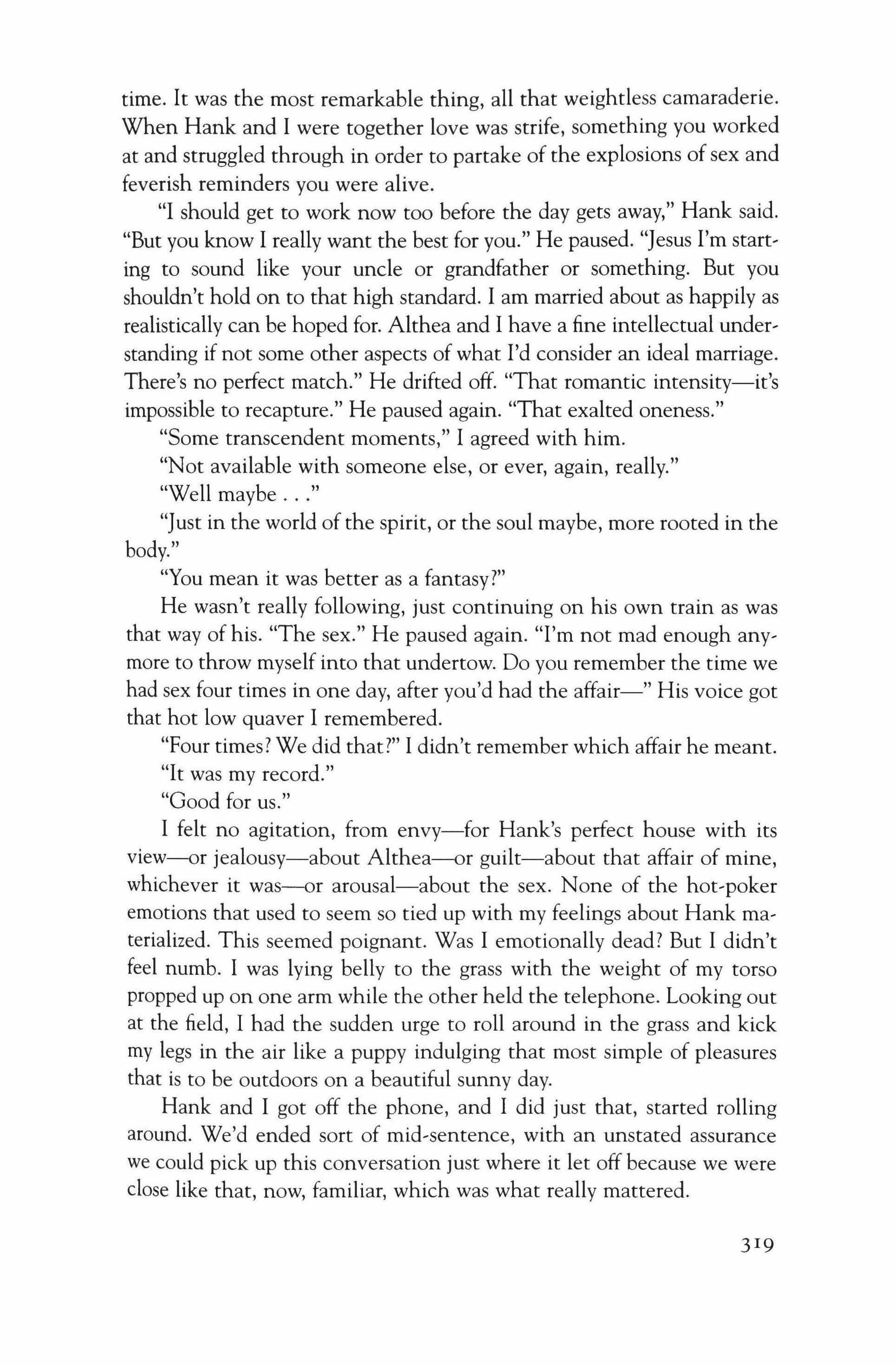
time. It was the most remarkable thing, all that weightless camaraderie. When Hank and I were together love was strife, something you worked at and struggled through in order to partake of the explosions of sex and feverish reminders you were alive.
"I should get to work now too before the day gets away," Hank said. "But you know I really want the best for you." He paused. "Jesus I'm start, ing to sound like your uncle or grandfather or something. But you shouldn't hold on to that high standard. I am married about as happily as realistically can be hoped for. Althea and I have a fine intellectual under, standing if not some other aspects of what I'd consider an ideal marriage. There's no perfect match." He drifted off. "That romantic intensity-it's impossible to recapture." He paused again. "That exalted oneness."
"Some transcendent moments," I agreed with him.
"Not available with someone else, or ever, again, really."
"Well maybe
"Just in the world of the spirit, or the soul maybe, more rooted in the body."
"You mean it was better as a fantasy?"
He wasn't really following, just continuing on his own train as was that way of his. "The sex." He paused again. "I'm not mad enough any, more to throw myself into that undertow. Do you remember the time we had sex four times in one day, after you'd had the affair-" His voice got that hot low quaver I remembered.
"Four times? We did that?" I didn't remember which affair he meant.
"It was my record."
"Good for us."
I felt no agitation, from envy-for Hank's perfect house with its view---or jealousy-about Althea--or guilt-about that affair of mine, whichever it was--or arousal-about the sex. None of the hot-poker emotions that used to seem so tied up with my feelings about Hank materialized. This seemed poignant. Was I emotionally dead? But I didn't feel numb. I was lying belly to the grass with the weight of my torso propped up on one arm while the other held the telephone. Looking out at the field, I had the sudden urge to roll around in the grass and kick my legs in the air like a puppy indulging that most simple of pleasures that is to be outdoors on a beautiful sunny day.
Hank and I got off the phone, and I did just that, started rolling around. We'd ended sort of mid-sentence, with an unstated assurance we could pick up this conversation just where it let off because we were close like that, now, familiar, which was what really mattered.
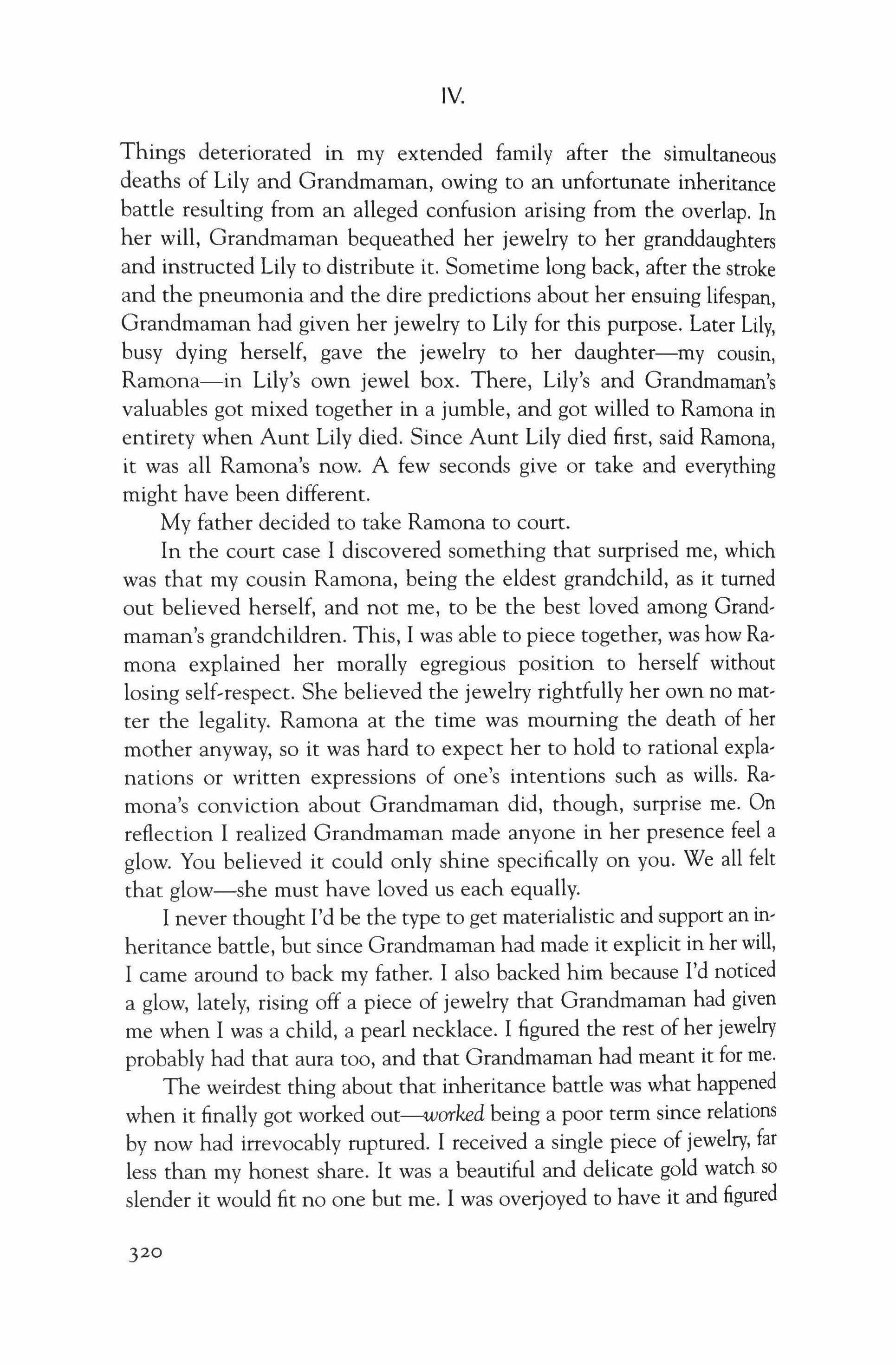
Things deteriorated in my extended family after the simultaneous deaths of Lily and Grandmaman, owing to an unfortunate inheritance battle resulting from an alleged confusion arising from the overlap. In her will, Grandmaman bequeathed her jewelry to her granddaughters and instructed Lily to distribute it. Sometime long back, after the stroke and the pneumonia and the dire predictions about her ensuing lifespan, Grandmaman had given her jewelry to Lily for this purpose. Later Lily, busy dying herself, gave the jewelry to her daughter-my cousin, Ramona-in Lily's own jewel box. There, Lily's and Grandmaman's valuables got mixed together in a jumble, and got willed to Ramona in entirety when Aunt Lily died. Since Aunt Lily died first, said Ramona, it was all Ramona's now. A few seconds give or take and everything might have been different.
My father decided to take Ramona to court.
In the court case I discovered something that surprised me, which was that my cousin Ramona, being the eldest grandchild, as it turned out believed herself, and not me, to be the best loved among Grandmaman's grandchildren. This, I was able to piece together, was how Ramona explained her morally egregious position to herself without losing self-respect. She believed the jewelry rightfully her own no matter the legality. Ramona at the time was mourning the death of her mother anyway, so it was hard to expect her to hold to rational explanations or written expressions of one's intentions such as wills. Ramona's conviction about Grandmaman did, though, surprise me. On reflection I realized Grandmaman made anyone in her presence feel a glow. You believed it could only shine specifically on you. We all felt that glow-she must have loved us each equally.
I never thought I'd be the type to get materialistic and support an inheritance battle, but since Grandmaman had made it explicit in her will, I came around to back my father. I also backed him because I'd noticed a glow, lately, rising off a piece of jewelry that Grandmaman had given me when I was a child, a pearl necklace. I figured the rest of her jewelry probably had that aura too, and that Grandmaman had meant it for me.
The weirdest thing about that inheritance battle was what happened when it finally got worked out---worked being a poor term since relations by now had irrevocably ruptured. I received a single piece of jewelry, far less than my honest share. It was a beautiful and delicate gold watch so slender it would fit no one but me. I was overjoyed to have it and figured
IV.
320
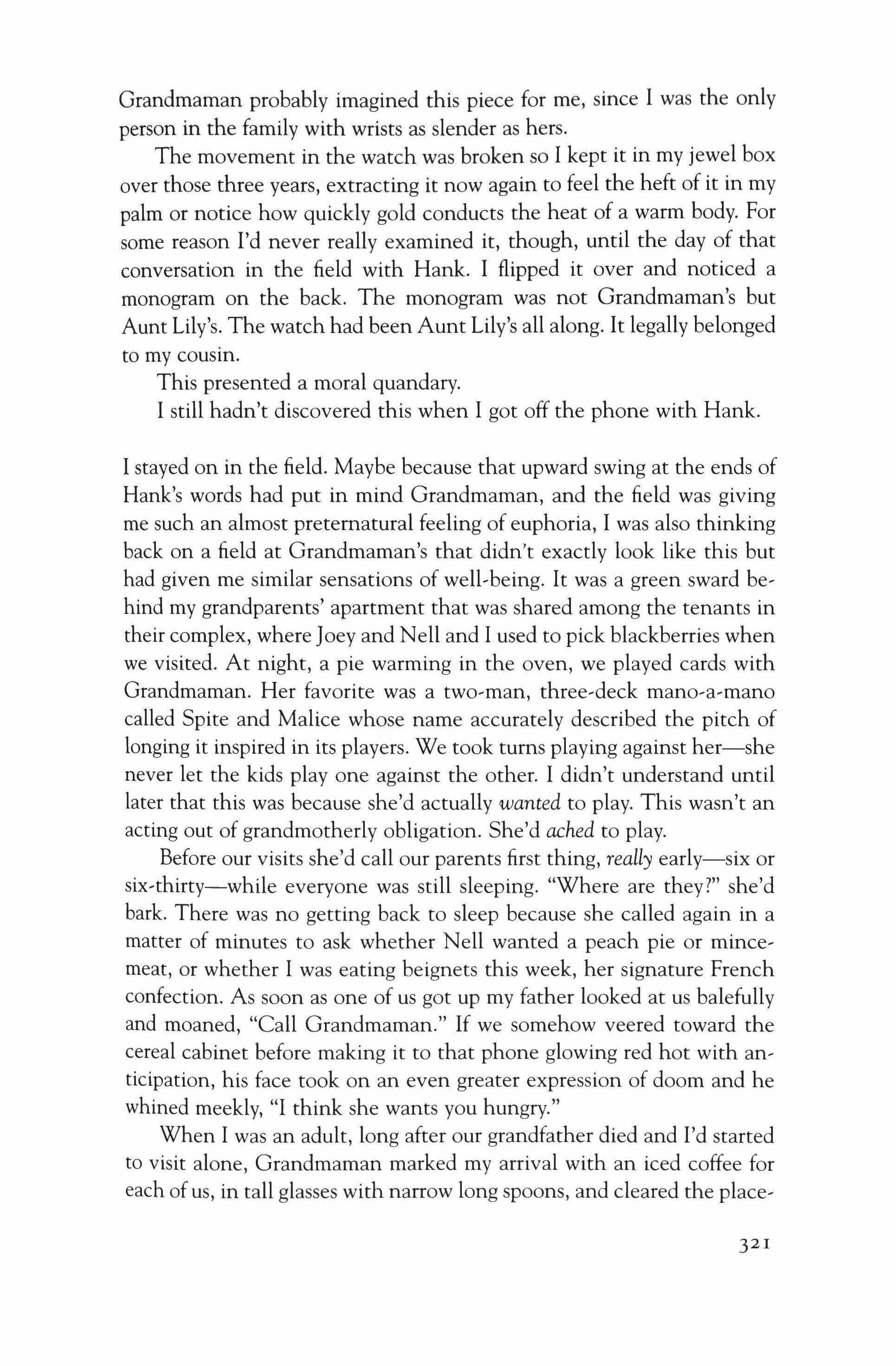
Grandmaman probably imagined this piece for me, since I was the only person in the family with wrists as slender as hers.
The movement in the watch was broken so I kept it in my jewel box over those three years, extracting it now again to feel the heft of it in my palm or notice how quickly gold conducts the heat of a warm body. For some reason I'd never really examined it, though, until the day of that conversation in the field with Hank. I flipped it over and noticed a monogram on the back. The monogram was not Grandmaman's but Aunt Lily's. The watch had been Aunt Lily's all along. It legally belonged to my cousin.
This presented a moral quandary.
I still hadn't discovered this when I got off the phone with Hank.
I stayed on in the field. Maybe because that upward swing at the ends of Hank's words had put in mind Grandmaman, and the field was giving me such an almost preternatural feeling of euphoria, I was also thinking back on a field at Grandmaman's that didn't exactly look like this but had given me similar sensations of well-being. It was a green sward be, hind my grandparents' apartment that was shared among the tenants in their complex, where Joey and Nell and I used to pick blackberries when we visited. At night, a pie warming in the oven, we played cards with Grandmaman. Her favorite was a two'man, three,deck mano-a-rnano called Spite and Malice whose name accurately described the pitch of longing it inspired in its players. We took turns playing against her-she never let the kids play one against the other. I didn't understand until later that this was because she'd actually wanted to play. This wasn't an acting out of grandmotherly obligation. She'd ached to play.
Before our visits she'd call our parents first thing, really early-six or six,thirty-while everyone was still sleeping. "Where are they?" she'd bark. There was no getting back to sleep because she called again in a matter of minutes to ask whether Nell wanted a peach pie or mince' meat, or whether I was eating beignets this week, her signature French confection. As soon as one of us got up my father looked at us balefully and moaned, "Call Grandmaman." If we somehow veered toward the cereal cabinet before making it to that phone glowing red hot with an, ticipation, his face took on an even greater expression of doom and he whined meekly, "I think she wants you hungry."
When I was an adult, long after our grandfather died and I'd started to visit alone, Grandmaman marked my arrival with an iced coffee for each of us, in tall glasses with narrow long spoons, and cleared the place,
321
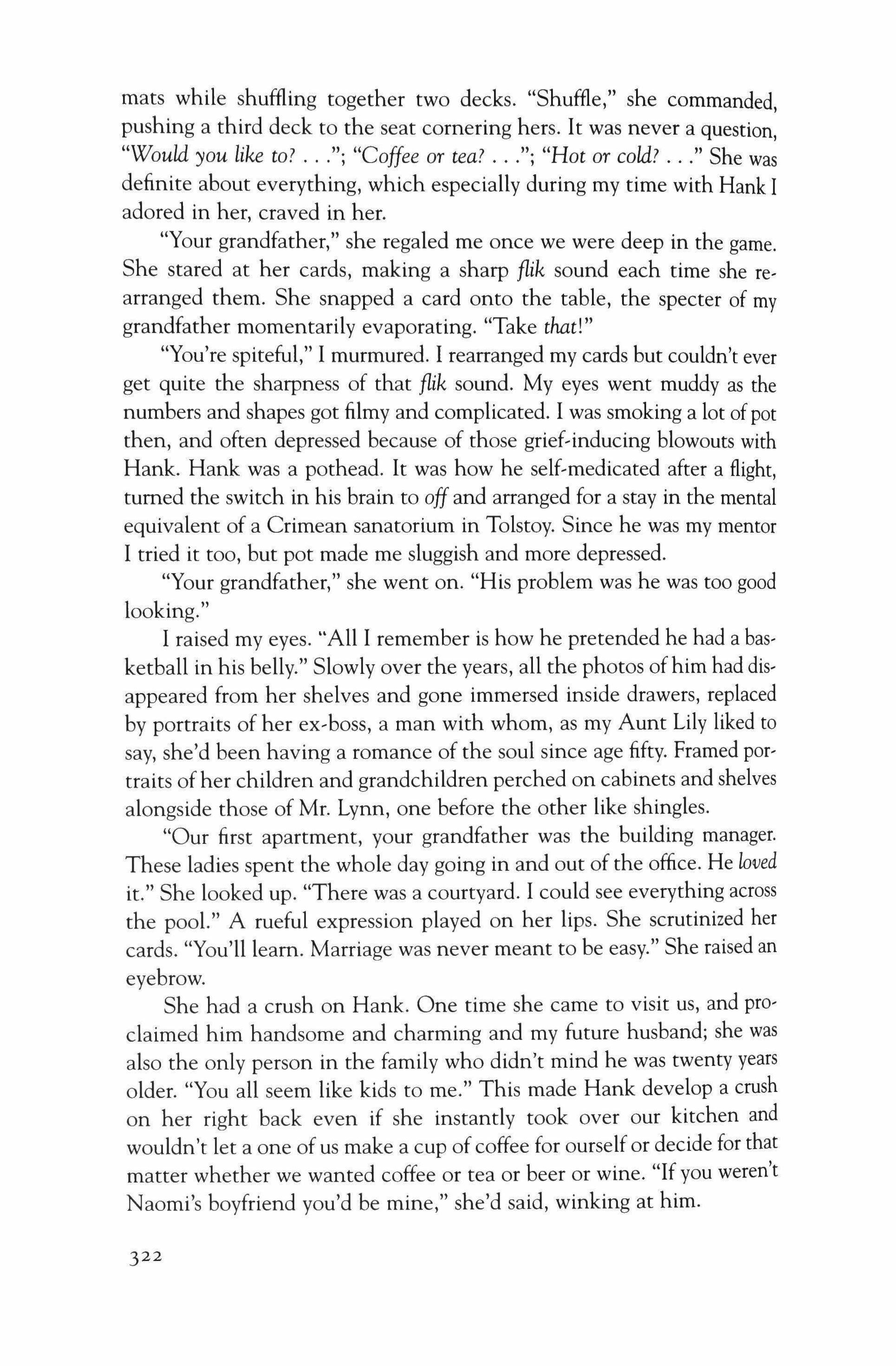
mats while shuffling together two decks. "Shuffle," she commanded pushing a third deck to the seat cornering hers. It was never a question, «wz ld l'ke 7 ""C ,i{ 7" "H ld7" Sh wOU you 1 to ; ojJee or tea ; at or co e was definite about everything, which especially during my time with Hank I adored in her, craved in her.
"Your grandfather," she regaled me once we were deep in the game. She stared at her cards, making a sharp flik sound each time she rearranged them. She snapped a card onto the table, the specter of my grandfather momentarily evaporating. "Take that!"
"You're spiteful," I murmured. I rearranged my cards but couldn't ever get quite the sharpness of that flik sound. My eyes went muddy as the numbers and shapes got filmy and complicated. I was smoking a lot of pot then, and often depressed because of those grief-inducing blowouts with Hank. Hank was a pothead. It was how he self-medicated after a flight, turned the switch in his brain to off and arranged for a stay in the mental equivalent of a Crimean sanatorium in Tolstoy. Since he was my mentor I tried it too, but pot made me sluggish and more depressed.
"Your grandfather," she went on. "His problem was he was too good looking."
I raised my eyes. "All I remember is how he pretended he had a basketball in his belly." Slowly over the years, all the photos ofhim had disappeared from her shelves and gone immersed inside drawers, replaced by portraits of her ex-boss, a man with whom, as my Aunt Lily liked to say, she'd been having a romance of the soul since age fifty. Framed portraits ofher children and grandchildren perched on cabinets and shelves alongside those of Mr. Lynn, one before the other like shingles.
"Our first apartment, your grandfather was the building manager. These ladies spent the whole day going in and out of the office. He loved it." She looked up. "There was a courtyard. I could see everything across the pool." A rueful expression played on her lips. She scrutinized her cards. "You'll learn. Marriage was never meant to be easy." She raised an eyebrow.
She had a crush on Hank. One time she came to visit us, and proclaimed him handsome and charming and my future husband; she was also the only person in the family who didn't mind he was twenty years older. "You all seem like kids to me." This made Hank develop a crush on her right back even if she instantly took over our kitchen and wouldn't let a one of us make a cup ofcoffee for ourself or decide for that matter whether we wanted coffee or tea or beer or wine. "If you weren't Naomi's boyfriend you'd be mine," she'd said, winking at him.
322
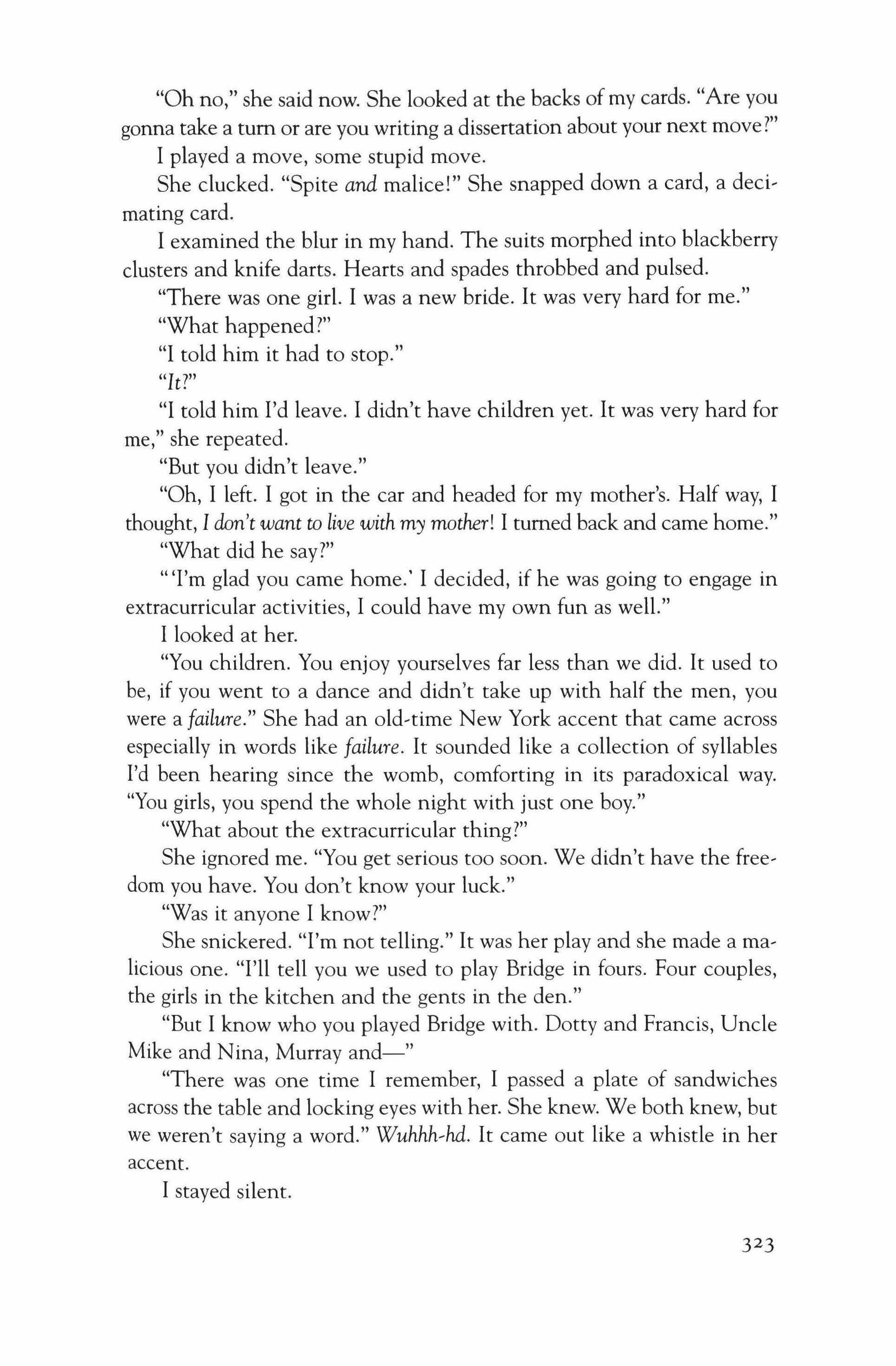
"Oh no," she said now. She looked at the backs of my cards. "Are you gonna take a tum or are you writing a dissertation about your next move?"
I played a move, some stupid move.
She clucked. "Spite and malice!" She snapped down a card, a decimating card.
I examined the blur in my hand. The suits morphed into blackberry clusters and knife darts. Hearts and spades throbbed and pulsed.
"There was one girl. I was a new bride. It was very hard for me."
"What happened?"
"I told him it had to stop."
"It?"
"I told him I'd leave. I didn't have children yet. It was very hard for me," she repeated.
"But you didn't leave."
"Oh, I left. I got in the car and headed for my mother's. Half way, I thought, I don't want to live with my mother! I turned back and came home."
"What did he say?"
"'I'm glad you came home.' I decided, if he was going to engage in extracurricular activities, I could have my own fun as well."
I looked at her.
"You children. You enjoy yourselves far less than we did. It used to be, if you went to a dance and didn't take up with half the men, you were a failure." She had an old-time New York accent that came across especially in words like failure. It sounded like a collection of syllables I'd been hearing since the womb, comforting in its paradoxical way. "You girls, you spend the whole night with just one boy."
"What about the extracurricular thing?"
She ignored me. "You get serious too soon. We didn't have the freedom you have. You don't know your luck."
"Was it anyone I know?"
She snickered. "I'm not telling." It was her play and she made a rna, licious one. "I'll tell you we used to play Bridge in fours. Four couples, the girls in the kitchen and the gents in the den."
"But I know who you played Bridge with. Dotty and Francis, Uncle Mike and Nina, Murray and-"
"There was one time I remember, I passed a plate of sandwiches across the table and locking eyes with her. She knew. We both knew, but we weren't saying a word." Wuhhh,hd. It came out like a whistle in her accent.
I stayed silent. 323
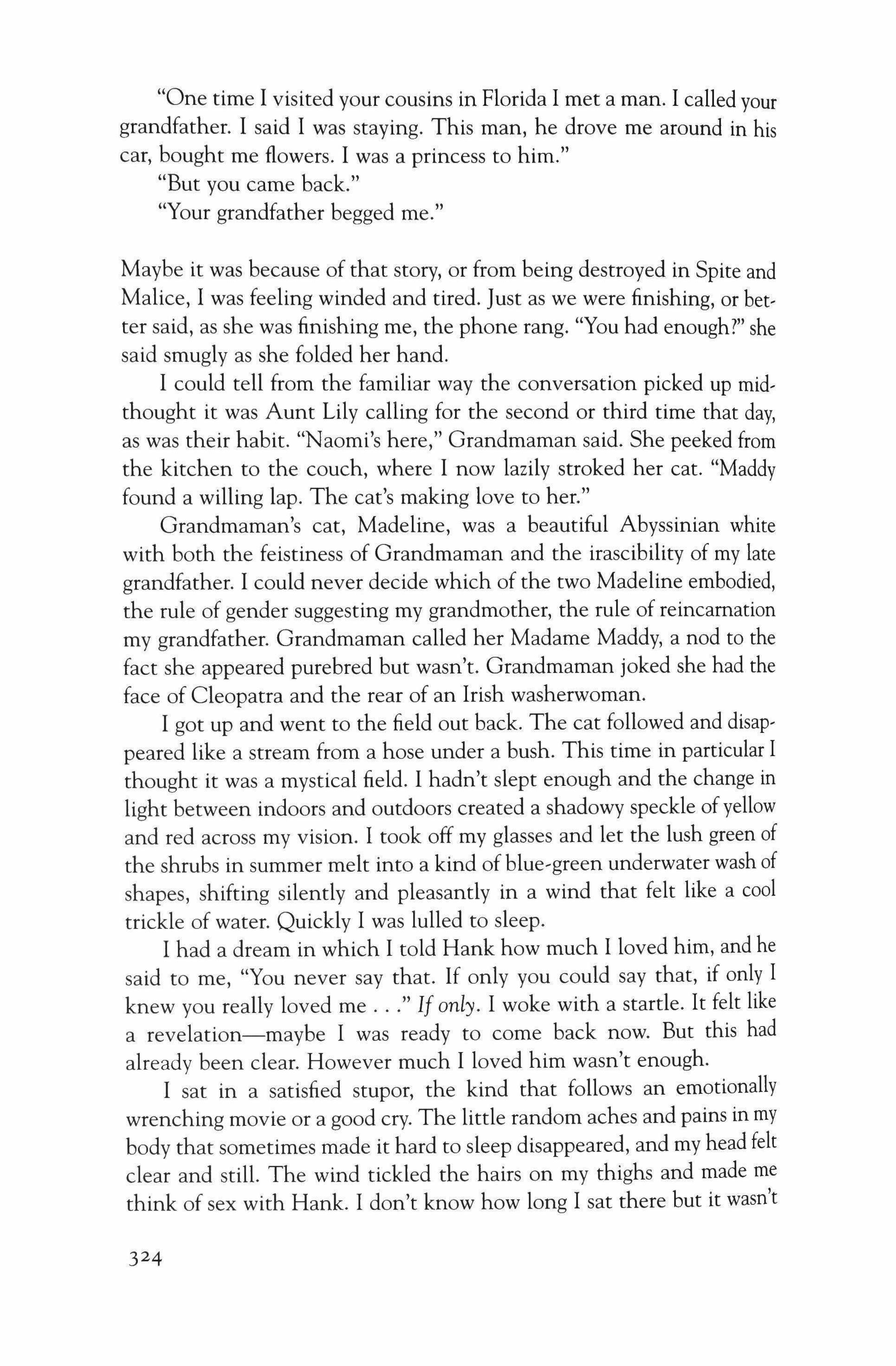
"One time I visited your cousins in Florida I met a man. I called your grandfather. I said I was staying. This man, he drove me around in his car, bought me flowers. I was a princess to him."
"But you came back."
"Your grandfather begged me."
Maybe it was because of that story, or from being destroyed in Spite and Malice, I was feeling winded and tired. Just as we were finishing, or better said, as she was finishing me, the phone rang. "You had enough?" she said smugly as she folded her hand.
I could tell from the familiar way the conversation picked up midthought it was Aunt Lily calling for the second or third time that day, as was their habit. "Naomi's here," Grandmaman said. She peeked from the kitchen to the couch, where I now lazily stroked her cat. "Maddy found a willing lap. The eat's making love to her."
Grandmaman's cat, Madeline, was a beautiful Abyssinian white with both the feistiness of Grandmaman and the irascibility of my late grandfather. I could never decide which of the two Madeline embodied, the rule of gender suggesting my grandmother, the rule of reincarnation my grandfather. Grandmaman called her Madame Maddy, a nod to the fact she appeared purebred but wasn't. Grandmaman joked she had the face of Cleopatra and the rear of an Irish washerwoman.
I got up and went to the field out back. The cat followed and disappeared like a stream from a hose under a bush. This time in particular I thought it was a mystical field. I hadn't slept enough and the change in light between indoors and outdoors created a shadowy speckle ofyellow and red across my vision. I took off my glasses and let the lush green of the shrubs in summer melt into a kind of blue-green underwater wash of shapes, shifting silently and pleasantly in a wind that felt like a cool trickle of water. Quickly I was lulled to sleep.
I had a dream in which I told Hank how much I loved him, and he said to me, "You never say that. If only you could say that, if only I knew you really loved me If only. I woke with a startle. It felt like a revelation-maybe I was ready to come back now. But this had already been clear. However much I loved him wasn't enough.
I sat in a satisfied stupor, the kind that follows an emotionally wrenching movie or a good cry. The little random aches and pains in my body that sometimes made it hard to sleep disappeared, and my head felt clear and still. The wind tickled the hairs on my thighs and made me think of sex with Hank. I don't know how long I sat there but it wasn't
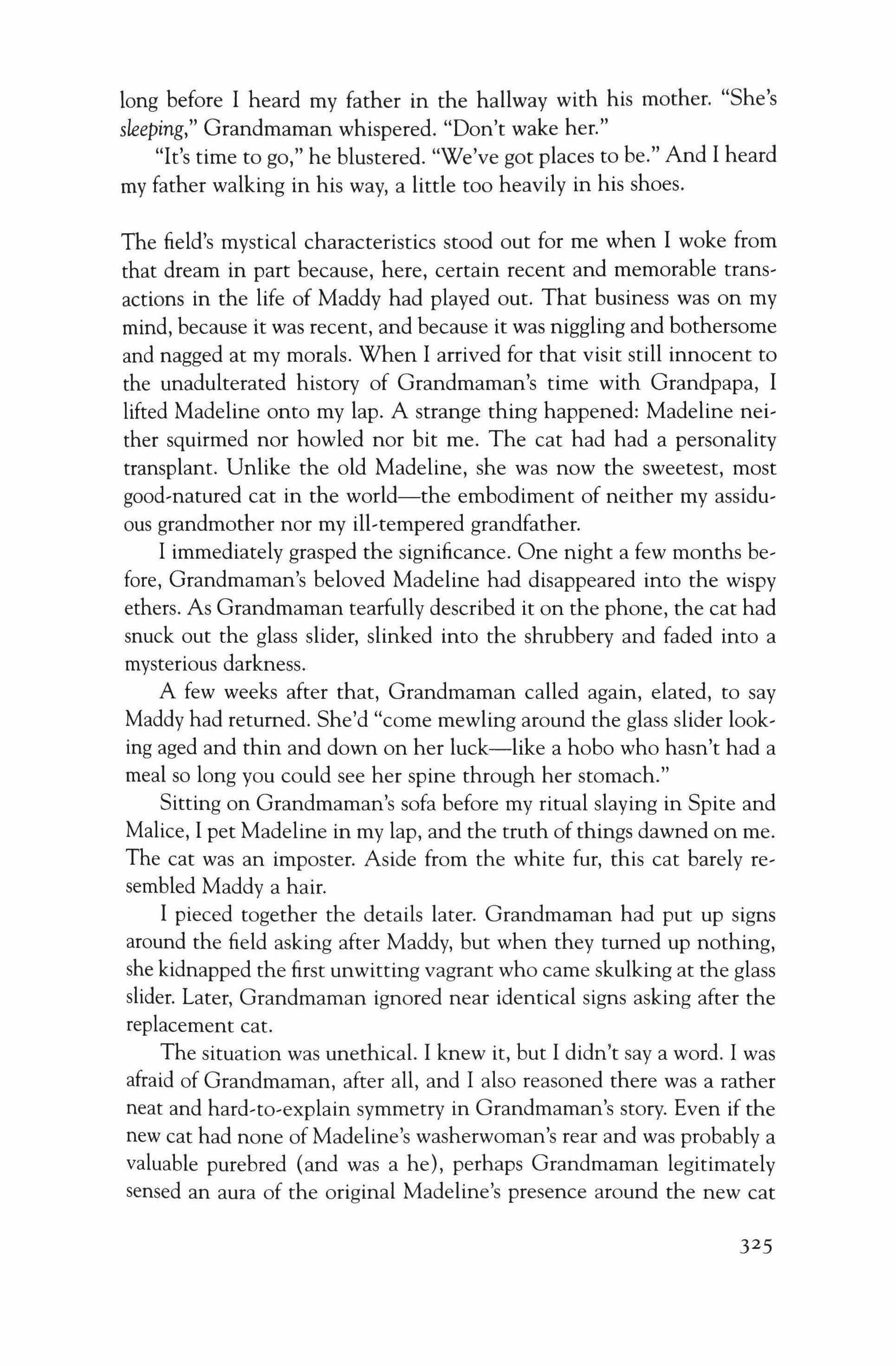
long before I heard my father in the hallway with his mother. "She's sleeping," Grandmaman whispered. "Don't wake her."
"It's time to go," he blustered. "We've got places to be." And I heard my father walking in his way, a little too heavily in his shoes.
The field's mystical characteristics stood out for me when I woke from that dream in part because, here, certain recent and memorable transactions in the life of Maddy had played out. That business was on my mind, because it was recent, and because it was niggling and bothersome and nagged at my morals. When I arrived for that visit still innocent to the unadulterated history of Grandmaman's time with Grandpapa, I lifted Madeline onto my lap. A strange thing happened: Madeline neither squirmed nor howled nor bit me. The cat had had a personality transplant. Unlike the old Madeline, she was now the sweetest, most good-natured cat in the world-the embodiment of neither my assiduous grandmother nor my ill-tempered grandfather.
I immediately grasped the significance. One night a few months before, Grandmaman's beloved Madeline had disappeared into the wispy ethers. As Grandmaman tearfully described it on the phone, the cat had snuck out the glass slider, slinked into the shrubbery and faded into a mysterious darkness.
A few weeks after that, Grandmaman called again, elated, to say Maddy had returned. She'd "come mewling around the glass slider looking aged and thin and down on her luck-like a hobo who hasn't had a meal so long you could see her spine through her stomach."
Sitting on Grandmaman's sofa before my ritual slaying in Spite and Malice, I pet Madeline in my lap, and the truth of things dawned on me. The cat was an imposter. Aside from the white fur, this cat barely resembled Maddy a hair.
I pieced together the details later. Grandmaman had put up signs around the field asking after Maddy, but when they turned up nothing, she kidnapped the first unwitting vagrant who came skulking at the glass slider. Later, Grandmaman ignored near identical signs asking after the replacement cat.
The situation was unethical. I knew it, but I didn't say a word. I was afraid of Grandmaman, after all, and I also reasoned there was a rather neat and hard-to-explain symmetry in Grandmaman's story. Even if the new cat had none of Madeline's washerwoman's rear and was probably a valuable purebred {and was a he}, perhaps Grandmaman legitimately sensed an aura of the original Madeline's presence around the new cat
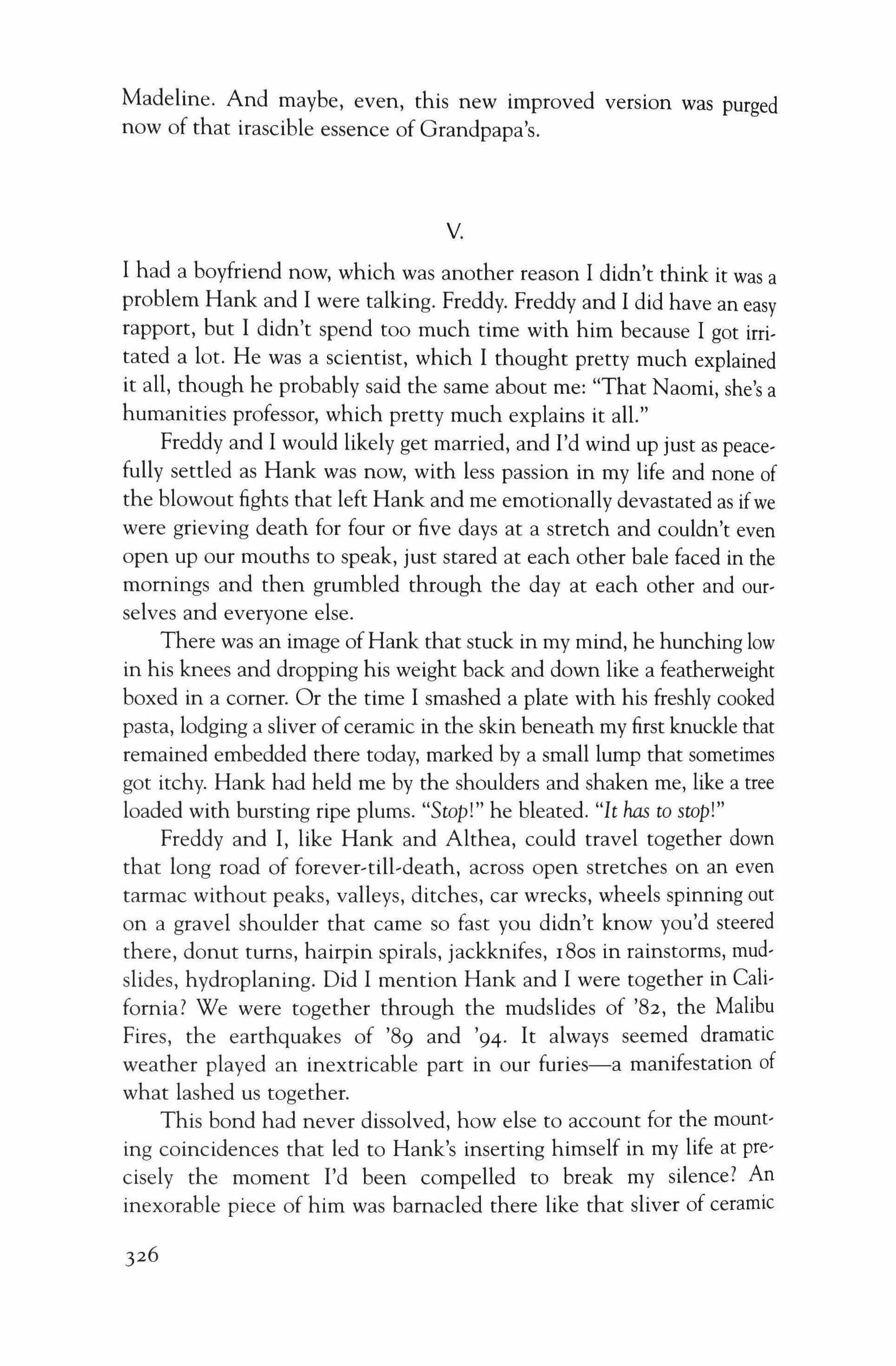
Madeline. And maybe, even, this new improved version was purged now of that irascible essence of Grandpapa's. v.
I had a boyfriend now, which was another reason I didn't think it was a problem Hank and I were talking. Freddy. Freddy and I did have an easy rapport, but I didn't spend too much time with him because I got irritated a lot. He was a scientist, which I thought pretty much explained it all, though he probably said the same about me: "That Naomi, she's a humanities professor, which pretty much explains it all."
Freddy and I would likely get married, and I'd wind up just as peacefully settled as Hank was now, with less passion in my life and none of the blowout fights that left Hank and me emotionally devastated as if we were grieving death for four or five days at a stretch and couldn't even open up our mouths to speak, just stared at each other bale faced in the mornings and then grumbled through the day at each other and ourselves and everyone else.
There was an image of Hank that stuck in my mind, he hunching low in his knees and dropping his weight back and down like a featherweight boxed in a comer. Or the time I smashed a plate with his freshly cooked pasta, lodging a sliver of ceramic in the skin beneath my first knuckle that remained embedded there today, marked by a small lump that sometimes got itchy. Hank had held me by the shoulders and shaken me, like a tree loaded with bursting ripe plums. "Stop!" he bleated. "It has to stop!"
Freddy and I, like Hank and Althea, could travel together down that long road of forever-till-death, across open stretches on an even tarmac without peaks, valleys, ditches, car wrecks, wheels spinning out on a gravel shoulder that came so fast you didn't know you'd steered there, donut turns, hairpin spirals, jackknifes, 180s in rainstorms, mudslides, hydroplaning. Did I mention Hank and I were together in California? We were together through the mudslides of '82, the Malibu Fires, the earthquakes of '89 and '94. It always seemed dramatic weather played an inextricable part in our furies-a manifestation of what lashed us together.
This bond had never dissolved, how else to account for the mounting coincidences that led to Hank's inserting himself in my life at precisely the moment I'd been compelled to break my silence? An inexorable piece of him was barnacled there like that sliver of ceramic
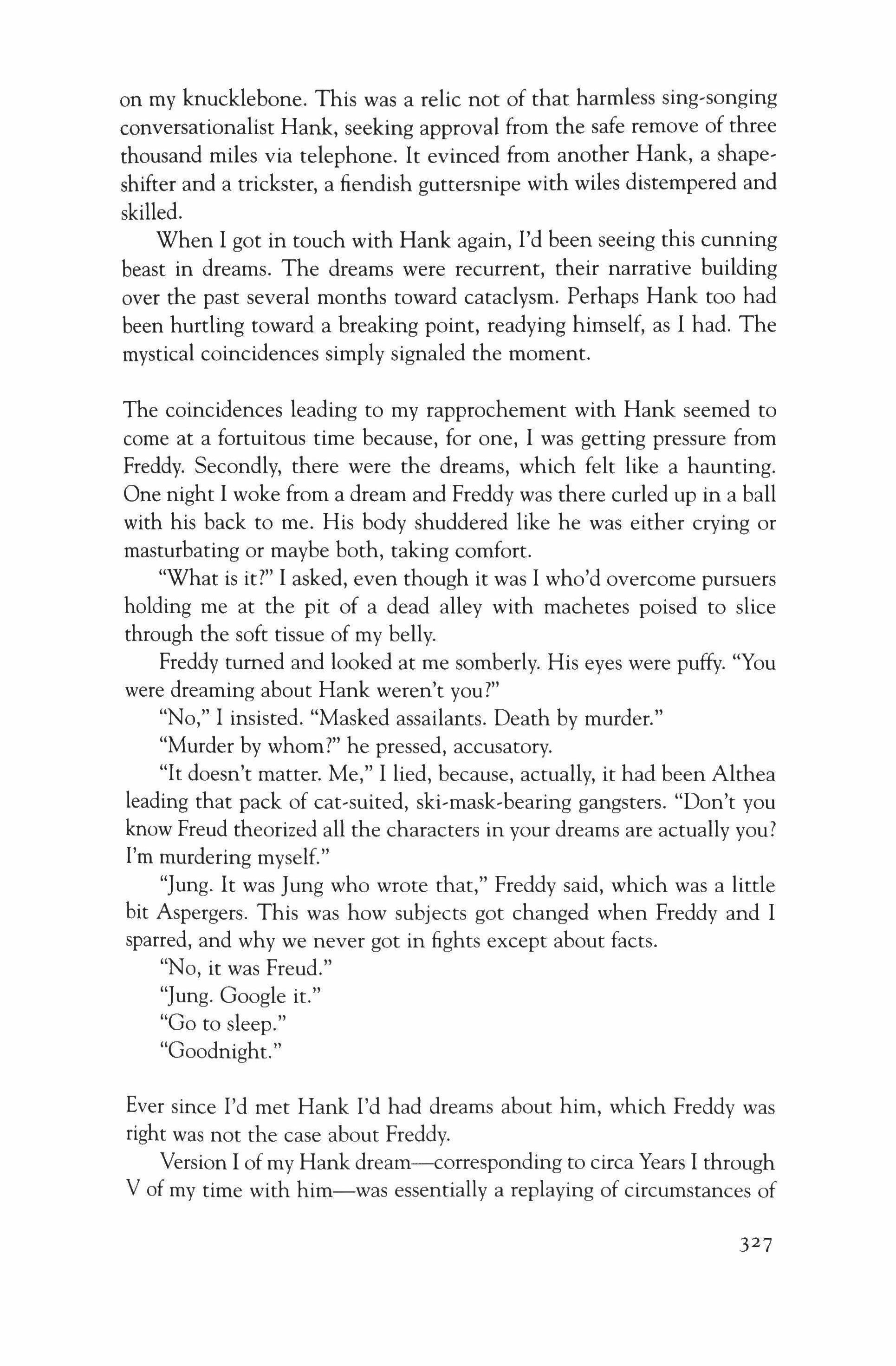
on my knucklebone. This was a relic not of that harmless sing-songing conversationalist Hank, seeking approval from the safe remove of three thousand miles via telephone. It evinced from another Hank, a shapeshifter and a trickster, a fiendish guttersnipe with wiles distempered and skilled.
When I got in touch with Hank again, I'd been seeing this cunning beast in dreams. The dreams were recurrent, their narrative building over the past several months toward cataclysm. Perhaps Hank too had been hurtling toward a breaking point, readying himself, as I had. The mystical coincidences simply signaled the moment.
The coincidences leading to my rapprochement with Hank seemed to come at a fortuitous time because, for one, I was getting pressure from Freddy. Secondly, there were the dreams, which felt like a haunting. One night I woke from a dream and Freddy was there curled up in a ball with his back to me. His body shuddered like he was either crying or masturbating or maybe both, taking comfort.
"What is it?" I asked, even though it was I who'd overcome pursuers holding me at the pit of a dead alley with machetes poised to slice through the soft tissue of my belly.
Freddy turned and looked at me somberly. His eyes were puffy. "You were dreaming about Hank weren't you?"
"No," I insisted. "Masked assailants. Death by murder."
"Murder by whom?" he pressed, accusatory.
"It doesn't matter. Me," I lied, because, actually, it had been Althea leading that pack of cat-suited, ski-mask-bearing gangsters. "Don't you know Freud theorized all the characters in your dreams are actually you? I'm murdering myself."
"[ung. It was [ung who wrote that," Freddy said, which was a little bit Aspergers. This was how subjects got changed when Freddy and I sparred, and why we never got in fights except about facts.
"No, it was Freud."
"J G 1'" ung. oog e It.
"Go to sleep."
"Goodnight.
Ever since I'd met Hank I'd had dreams about him, which Freddy was right was not the case about Freddy.
Version I of my Hank dream--corresponding to circa Years I through V of my time with him-was essentially a replaying of circumstances of
327
reality, in which I shocked and disgusted and devastated my previous beau-a college boy-by walking out on him while he was away on an interview for his first big job. In his absence I moved in with Hank, my professor. In the dream, I am discovered fragrante amorosa in the arms of Hank. I am tearful with guilt, my heart pounding like an andiron as I attempt to rationalize my betrayal to myself and the two men.
Version II-circa Years V to X-is essentially the same only the characters flip flop. Poor Hank steps into the upstairs loft of the beautiful farmhouse he retooled practically by hand and then invited me to live in for free only to find me-yes-at that very moment ofsheer pleasure, in the arms of another. This narrative also borrowed liberally from reality, as I slept with everyone when I was with Hank. I was twenty when we met, too young for the obligations of love.
Version III persisted long past the demise of Hank and me, though the template stayed virtually the same-I am making love with someone. At the peak of orgasm, I am caught. I have betrayed or will betray or am in the process of betraying both men.
There was a short hiatus in my dreams before the advent of Version IV-a radically different dream.
In real life, after Hank I had a boyfriend for a number of years who it turned out was betraying me. He was sleeping with my best friend plus an army of virtual girlfriends whose 1M messages I discovered in a cache file on his computer. I immediately broke things off. Everything fell apart for me then, and for the first time since I'd left Hank I fell into that four-day-looks-like-griefdepression in which you can't say hello even to the espresso jerk at your coffee bar.
I didn't sleep for two weeks, and then plunged into a three-week state of fatigue so obliterating I didn't have a dream.
Whence Version IV: Hank and I have conspired to reunite, and, simply and neatly, Althea has scrammed. She has been a fiction all along, concocted by Hank to protect his pride, or she's left him for someone else, or she really just wanted the green card, or she's dying-of lymphoma or Hodgkin's or kidney failure. I could see where this was leading. Soon I'd murder her in my dreams, and do who knows what in real life.
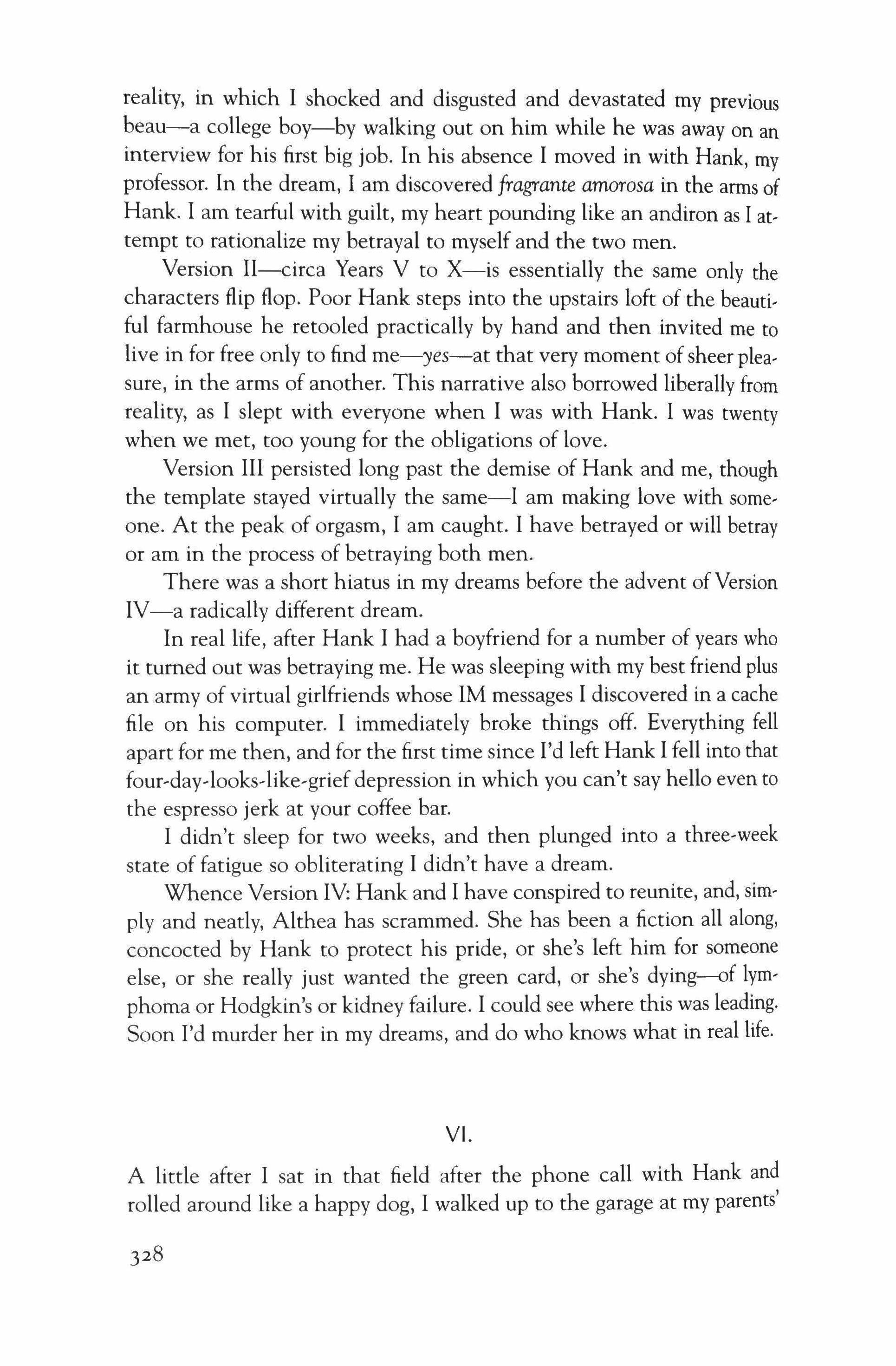
VI.
A little after I sat in that field after the phone call with Hank and rolled around like a happy dog, I walked up to the garage at my parents'
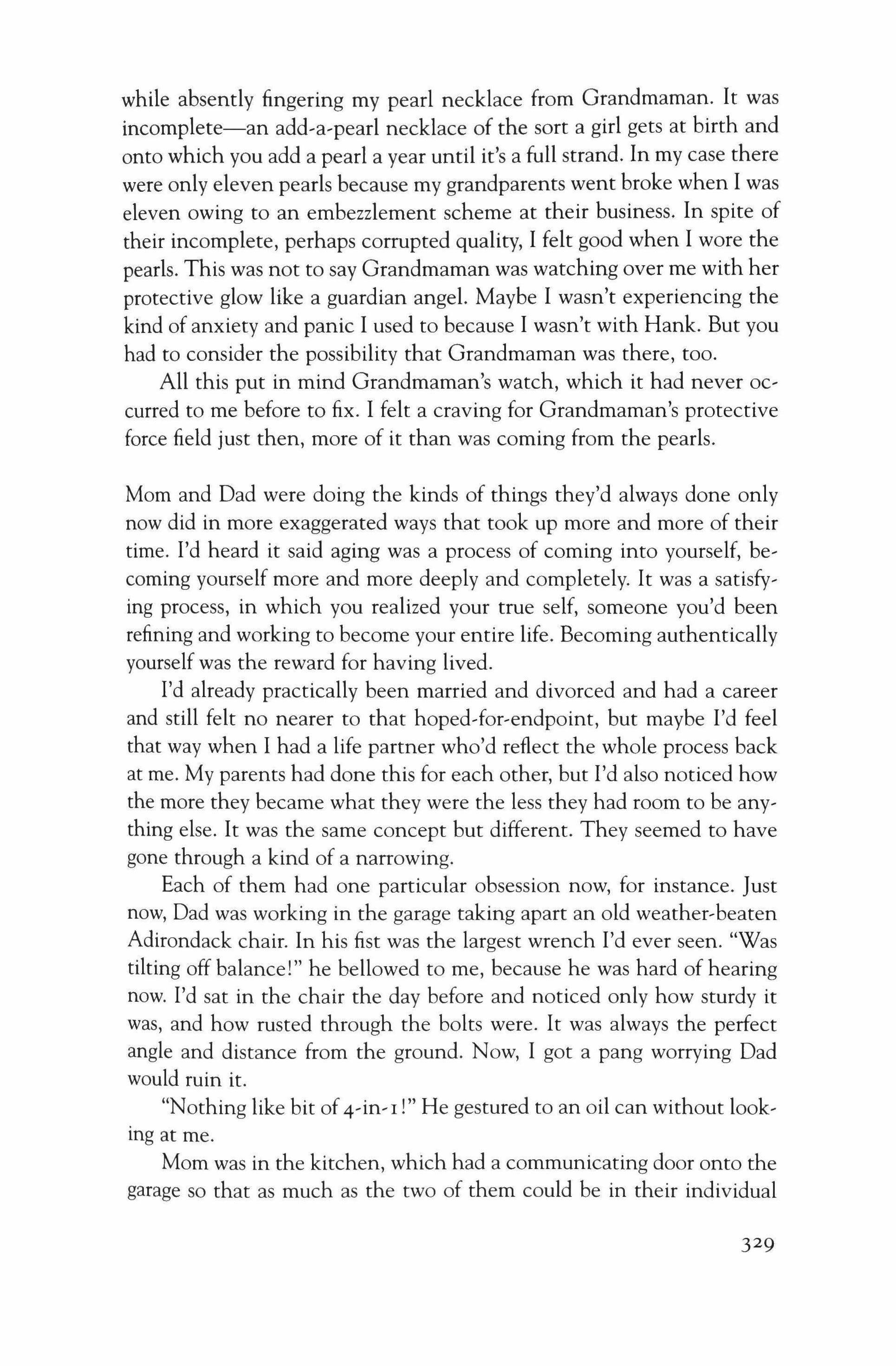
while absently fingering my pearl necklace from Grandmaman. It was incomplete-an add-a-pearl necklace of the sort a girl gets at birth and onto which you add a pearl a year until it's a full strand. In my case there were only eleven pearls because my grandparents went broke when I was eleven owing to an embezzlement scheme at their business. In spite of their incomplete, perhaps corrupted quality, I felt good when I wore the pearls. This was not to say Grandmaman was watching over me with her protective glow like a guardian angel. Maybe I wasn't experiencing the kind of anxiety and panic I used to because I wasn't with Hank. But you had to consider the possibility that Grandmaman was there, too.
All this put in mind Grandmaman's watch, which it had never occurred to me before to fix. I felt a craving for Grandmaman's protective force field just then, more of it than was coming from the pearls.
Mom and Dad were doing the kinds of things they'd always done only now did in more exaggerated ways that took up more and more of their time. I'd heard it said aging was a process of coming into yourself, becoming yourself more and more deeply and completely. It was a satisfying process, in which you realized your true self, someone you'd been refining and working to become your entire life. Becoming authentically yourself was the reward for having lived.
I'd already practically been married and divorced and had a career and still felt no nearer to that hoped-for-endpoint, but maybe I'd feel that way when I had a life partner who'd reflect the whole process back at me. My parents had done this for each other, but I'd also noticed how the more they became what they were the less they had room to be anything else. It was the same concept but different. They seemed to have gone through a kind of a narrowing.
Each of them had one particular obsession now, for instance. Just now, Dad was working in the garage taking apart an old weather-beaten Adirondack chair. In his fist was the largest wrench I'd ever seen. "Was tilting off balance!" he bellowed to me, because he was hard of hearing now. I'd sat in the chair the day before and noticed only how sturdy it was, and how rusted through the bolts were. It was always the perfect angle and distance from the ground. Now, I got a pang worrying Dad would ruin it.
"Nothing like bit of4�in�I!" He gestured to an oil can without looking at me.
Mom was in the kitchen, which had a communicating door onto the garage so that as much as the two of them could be in their individual
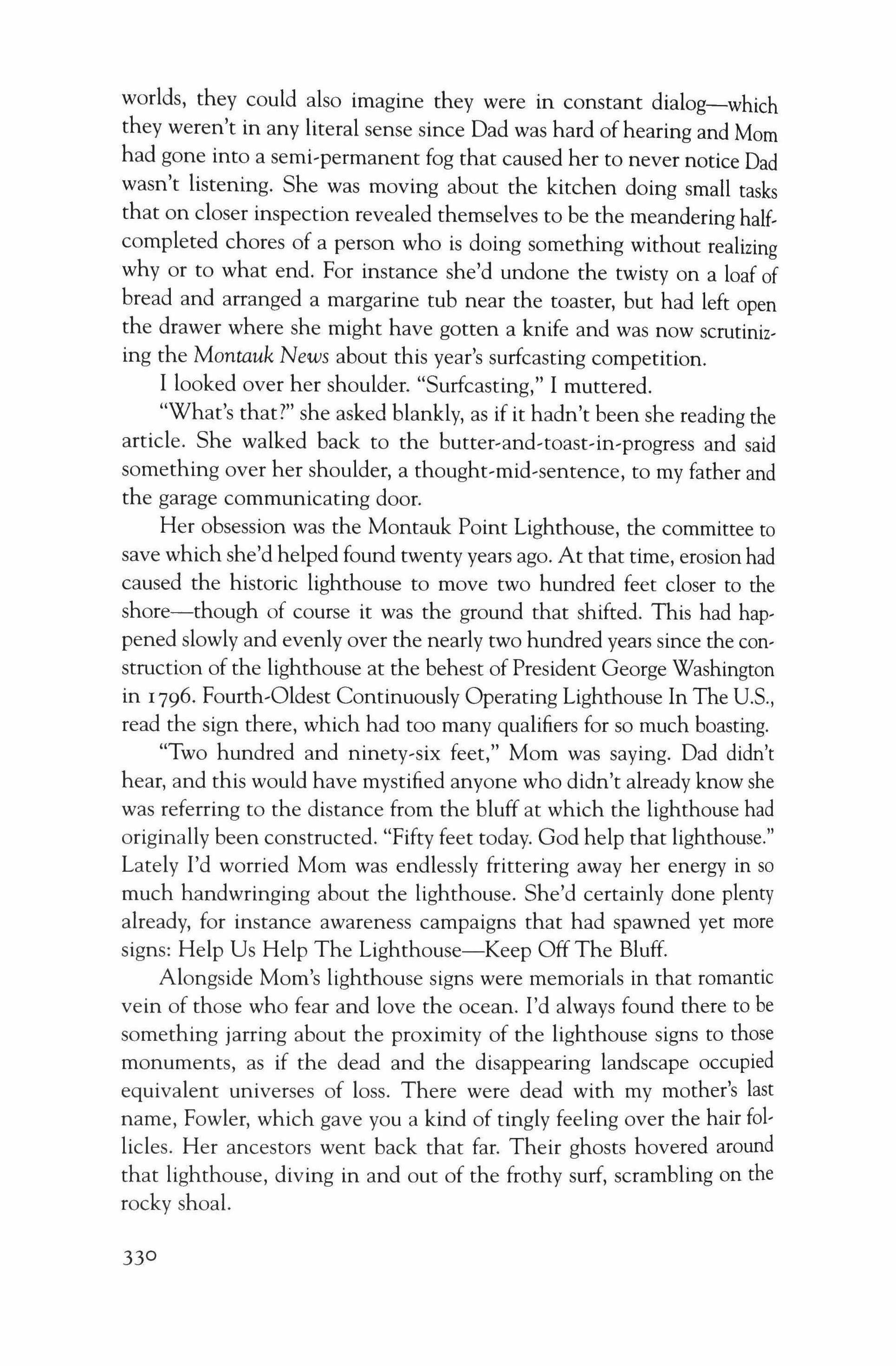
worlds, they could also imagine they were in constant dialog-which they weren't in any literal sense since Dad was hard of hearing and Mom had gone into a semi-permanent fog that caused her to never notice Dad wasn't listening. She was moving about the kitchen doing small tasks that on closer inspection revealed themselves to be the meandering halfcompleted chores of a person who is doing something without realizing why or to what end. For instance she'd undone the twisty on a loaf of bread and arranged a margarine tub near the toaster, but had left open the drawer where she might have gotten a knife and was now scrutinizing the Montauk News about this year's surfcasting competition.
I looked over her shoulder. "Surfcasting," I muttered.
"What's that?" she asked blankly, as if it hadn't been she reading the article. She walked back to the butter-and-toast-in-progress and said something over her shoulder, a thought-mid-sentence, to my father and the garage communicating door.
Her obsession was the Montauk Point Lighthouse, the committee to save which she'd helped found twenty years ago. At that time, erosion had caused the historic lighthouse to move two hundred feet closer to the shore-though of course it was the ground that shifted. This had happened slowly and evenly over the nearly two hundred years since the construction of the lighthouse at the behest of President George Washington in 1796. Fourth-Oldest Continuously Operating Lighthouse In The U.S., read the sign there, which had too many qualifiers for so much boasting.
"Two hundred and ninety-six feet," Mom was saying. Dad didn't hear, and this would have mystified anyone who didn't already know she was referring to the distance from the bluff at which the lighthouse had originally been constructed. "Fifty feet today. God help that lighthouse." Lately I'd worried Mom was endlessly frittering away her energy in so much handwringing about the lighthouse. She'd certainly done plenty already, for instance awareness campaigns that had spawned yet more signs: Help Us Help The Lighthouse-Keep Off The Bluff.
Alongside Mom's lighthouse signs were memorials in that romantic vein of those who fear and love the ocean. I'd always found there to be something jarring about the proximity of the lighthouse signs to those monuments, as if the dead and the disappearing landscape occupied equivalent universes of loss. There were dead with my mother's last name, Fowler, which gave you a kind of tingly feeling over the hair follicles. Her ancestors went back that far. Their ghosts hovered around that lighthouse, diving in and out of the frothy surf, scrambling on the rocky shoal.
330
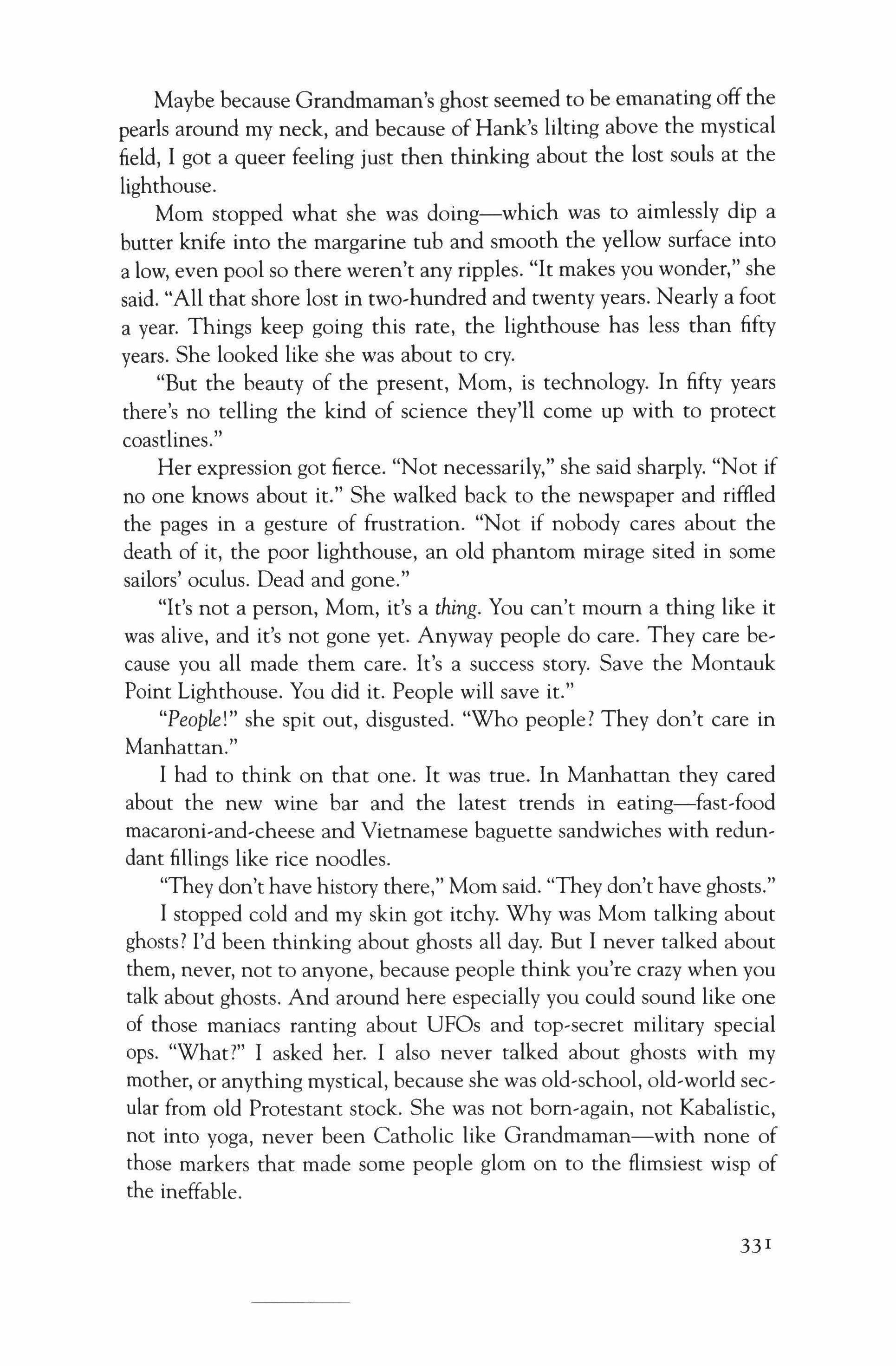
Maybe because Grandmaman's ghost seemed to be emanating off the pearls around my neck, and because of Hank's lilting above the mystical field, I got a queer feeling just then thinking about the lost souls at the lighthouse.
Mom stopped what she was doing-which was to aimlessly dip a butter knife into the margarine tub and smooth the yellow surface into a low, even pool so there weren't any ripples. "It makes you wonder," she said. "All that shore lost in two-hundred and twenty years. Nearly a foot a year. Things keep going this rate, the lighthouse has less than fifty years. She looked like she was about to cry.
"But the beauty of the present, Mom, is technology. In fifty years there's no telling the kind of science they'll come up with to protect coastlines."
Her expression got fierce. "Not necessarily," she said sharply. "Not if no one knows about it." She walked back to the newspaper and riffled the pages in a gesture of frustration. "Not if nobody cares about the death of it, the poor lighthouse, an old phantom mirage sited in some sailors' oculus. Dead and gone."
"It's not a person, Mom, it's a thing. You can't mourn a thing like it was alive, and it's not gone yet. Anyway people do care. They care because you all made them care. It's a success story. Save the Montauk Point Lighthouse. You did it. People will save it."
"People!" she spit out, disgusted. "Who people? They don't care in Manhattan."
I had to think on that one. It was true. In Manhattan they cared about the new wine bar and the latest trends in eating-s-fast-food macaroni-and-cheese and Vietnamese baguette sandwiches with redundant fillings like rice noodles.
"They don't have history there," Mom said. "They don't have ghosts."
I stopped cold and my skin got itchy. Why was Mom talking about ghosts? I'd been thinking about ghosts all day. But I never talked about them, never, not to anyone, because people think you're crazy when you talk about ghosts. And around here especially you could sound like one of those maniacs ranting about UFOs and top-secret military special ops. "What?" I asked her. I also never talked about ghosts with my mother, or anything mystical, because she was old-school, old-world secular from old Protestant stock. She was not born-again, not Kabalistic, not into yoga, never been Catholic like Grandmaman-with none of those markers that made some people glom on to the flimsiest wisp of the ineffable.
331
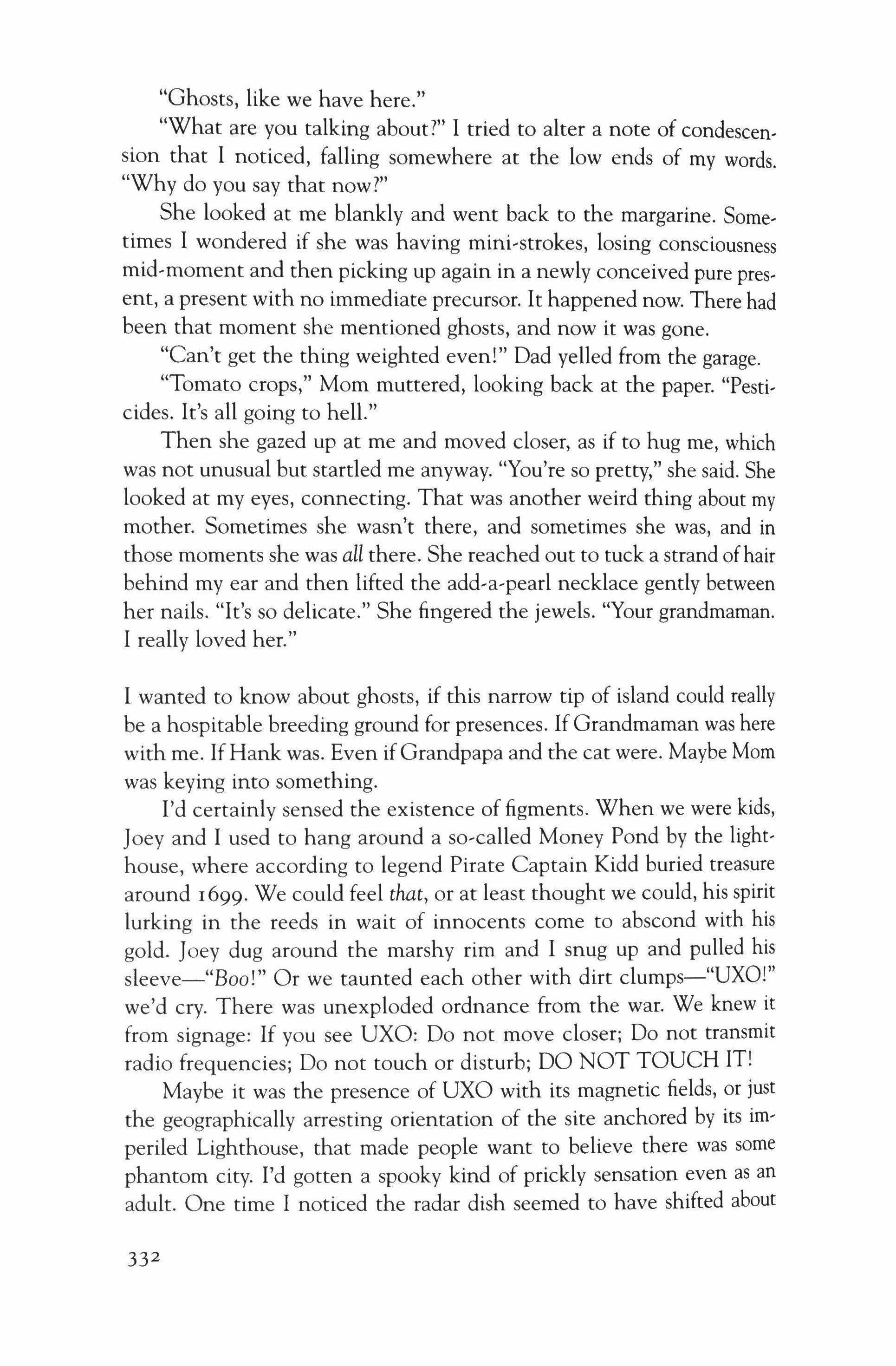
"Ghosts, like we have here."
"What are you talking about?" I tried to alter a note of condescension that I noticed, falling somewhere at the low ends of my words. "Why do you say that now?"
She looked at me blankly and went back to the margarine. Sometimes I wondered if she was having mini-strokes, losing consciousness mid-moment and then picking up again in a newly conceived pure present, a present with no immediate precursor. It happened now. There had been that moment she mentioned ghosts, and now it was gone.
"Can't get the thing weighted even!" Dad yelled from the garage.
"Tomato crops," Mom muttered, looking back at the paper. "Pesticides. It's all going to hell."
Then she gazed up at me and moved closer, as if to hug me, which was not unusual but startled me anyway. "You're so pretty," she said. She looked at my eyes, connecting. That was another weird thing about my mother. Sometimes she wasn't there, and sometimes she was, and in those moments she was all there. She reached out to tuck a strand ofhair behind my ear and then lifted the add-a-pearl necklace gently between her nails. "It's so delicate." She fingered the jewels. "Your grandmaman. I really loved her."
I wanted to know about ghosts, if this narrow tip of island could really be a hospitable breeding ground for presences. If Grandmaman was here with me. If Hank was. Even ifGrandpapa and the cat were. Maybe Mom was keying into something.
I'd certainly sensed the existence of figments. When we were kids, Joey and I used to hang around a so-called Money Pond by the lighthouse, where according to legend Pirate Captain Kidd buried treasure around I699. We could feel that, or at least thought we could, his spirit lurking in the reeds in wait of innocents come to abscond with his gold. Joey dug around the marshy rim and I snug up and pulled his sleeve-"Boo!" Or we taunted each other with dirt clumps-"UXO!" we'd cry. There was unexploded ordnance from the war. We knew it from signage: If you see UXO: Do not move closer; Do not transmit radio frequencies; Do not touch or disturb; DO NOT TOUCH IT!
Maybe it was the presence of UXO with its magnetic fields, or just the geographically arresting orientation of the site anchored by its imperiled Lighthouse, that made people want to believe there was some phantom city. I'd gotten a spooky kind of prickly sensation even as an adult. One time I noticed the radar dish seemed to have shifted about
332
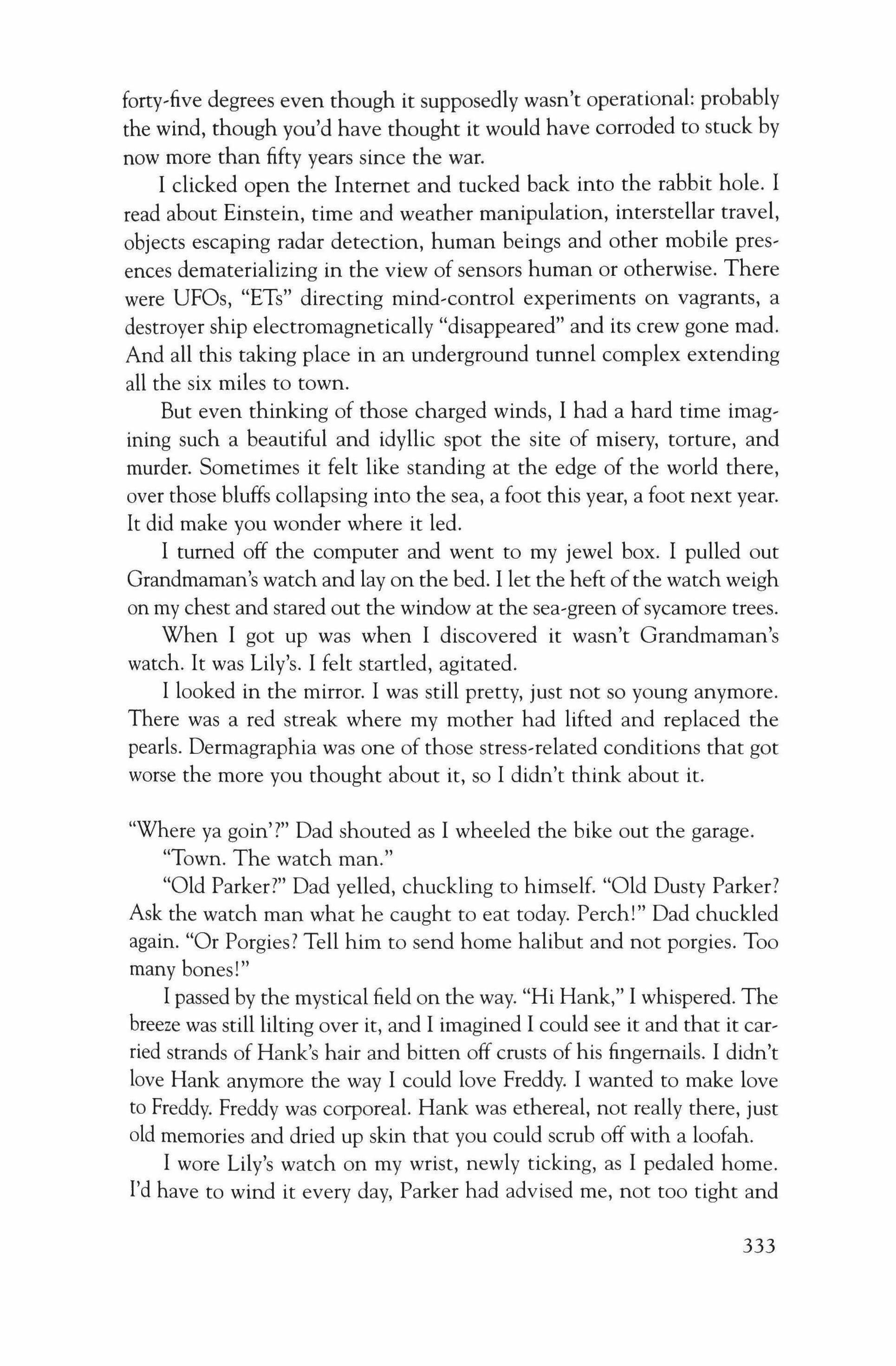
forty-five degrees even though it supposedly wasn't operational: probably the wind, though you'd have thought it would have corroded to stuck by now more than fifty years since the war.
I clicked open the Internet and tucked back into the rabbit hole. I read about Einstein, time and weather manipulation, interstellar travel, objects escaping radar detection, human beings and other mobile pres' ences dematerializing in the view of sensors human or otherwise. There were UFOs, "ETs" directing mind,control experiments on vagrants, a destroyer ship electromagnetically "disappeared" and its crew gone mad. And all this taking place in an underground tunnel complex extending all the six miles to town.
But even thinking of those charged winds, I had a hard time imagining such a beautiful and idyllic spot the site of misery, torture, and murder. Sometimes it felt like standing at the edge of the world there, over those bluffs collapsing into the sea, a foot this year, a foot next year. It did make you wonder where it led.
I turned off the computer and went to my jewel box. I pulled out Grandmaman's watch and lay on the bed. I let the heft ofthe watch weigh on my chest and stared out the window at the sea-green of sycamore trees.
When I got up was when I discovered it wasn't Grandmaman's watch. It was Lily's. I felt startled, agitated.
I looked in the mirror. I was still pretty, just not so young anymore. There was a red streak where my mother had lifted and replaced the pearls. Dermagraphia was one of those stress,related conditions that got worse the more you thought about it, so I didn't think about it.
"Where ya goin'?" Dad shouted as I wheeled the bike out the garage.
"Town. The watch man."
"Old Parker?" Dad yelled, chuckling to himself. "Old Dusty Parker? Ask the watch man what he caught to eat today. Perch!" Dad chuckled again. "Or Porgies? Tell him to send home halibut and not porgies. Too many bones!"
I passed by the mystical field on the way. "Hi Hank," I whispered. The breeze was still lilting over it, and I imagined I could see it and that it car, ried strands of Hank's hair and bitten off crusts of his fingernails. I didn't love Hank anymore the way I could love Freddy. I wanted to make love to Freddy. Freddy was corporeal. Hank was ethereal, not really there, just old memories and dried up skin that you could scrub off with a loofah.
I wore Lily's watch on my wrist, newly ticking, as I pedaled home. I'd have to wind it every day, Parker had advised me, not too tight and 333
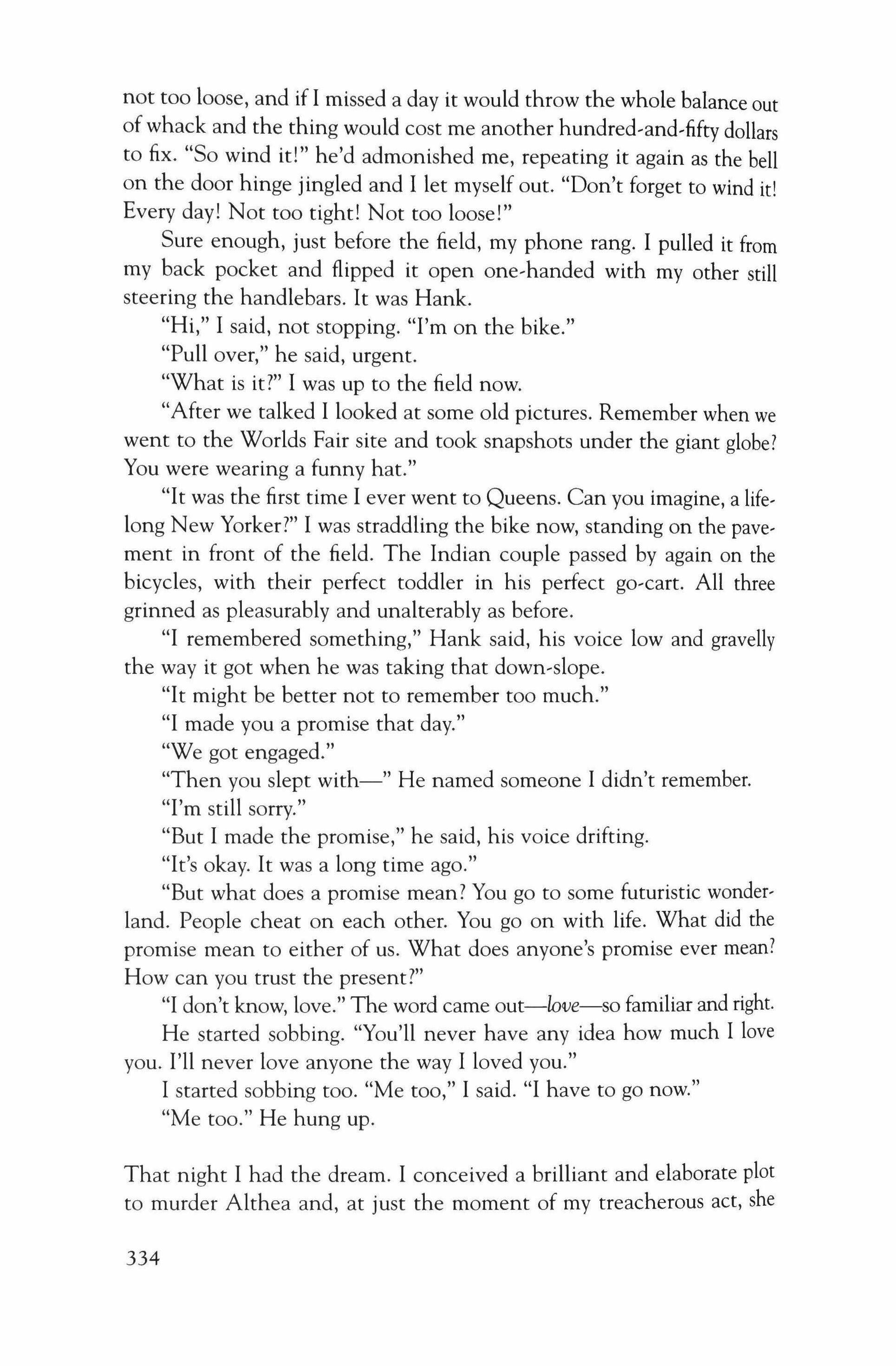
not too loose, and if I missed a day it would throw the whole balance out of whack and the thing would cost me another hundred-and-fifty dollars to fix. "So wind it!" he'd admonished me, repeating it again as the bell on the door hinge jingled and I let myself out. "Don't forget to wind it! Every day! Not too tight! Not too loose!"
Sure enough, just before the field, my phone rang. I pulled it from my back pocket and flipped it open one-handed with my other still steering the handlebars. It was Hank.
"Hi," I said, not stopping. "I'm on the bike."
"Pull over," he said, urgent.
"What is it?" I was up to the field now.
"After we talked I looked at some old pictures. Remember when we went to the Worlds Fair site and took snapshots under the giant globe? You were wearing a funny hat."
"It was the first time I ever went to Queens. Can you imagine, a lifelong New Yorker?" I was straddling the bike now, standing on the pavement in front of the field. The Indian couple passed by again on the bicycles, with their perfect toddler in his perfect go-cart. All three grinned as pleasurably and unalterably as before.
"I remembered something," Hank said, his voice low and gravelly the way it got when he was taking that down-slope.
"It might be better not to remember too much."
"I made you a promise that day."
"We got engaged."
"Then you slept with-" He named someone I didn't remember.
"I'm still sorry."
"But I made the promise," he said, his voice drifting.
"It's okay. It was a long time ago."
"But what does a promise mean? You go to some futuristic wonderland. People cheat on each other. You go on with life. What did the promise mean to either of us. What does anyone's promise ever mean? How can you trust the present?"
"I don't know, love." The word came out-love-so familiar and right. He started sobbing. "You'll never have any idea how much I love you. I'll never love anyone the way I loved you."
I started sobbing too. "Me too," I said. "I have to go now."
"Me too." He hung up.
That night I had the dream. I conceived a brilliant and elaborate plot to murder Althea and, at just the moment of my treacherous act, she
334
retrieved an ice pick and aimed it at my face. Freddy was waiting in the car. "Freddy?" I called meekly in the dream. I heard the patter of Freddy's footsteps across the doorjamb, childlike and ineffectual. Althea's ice pick angled into my face. I wrested the weapon from her grip and aimed it at her. I woke up.
An August storm drummed at the windows. My skin itched everywhere. I'd gone to bed with the watch on, and as I lay there trying to get to sleep I heard the tick-tick-tick of it racing and amplified. My heart pounded hard to keep up with it. The boom-boom-boom and the tick-ticktick sounded in stereophone. They were moving too fast.
I clicked on the light and looked at the watch and then looked at the clock and saw the watch really was fast. It had gained fifty minutes since I'd wound it twelve hours ago. I felt the spring and advanced it ever so slightly, to test it, but in that moment something snapped. I'd done it. I'd over-wound the watch. The ticking halted. I kept it on my wrist, and finally got back to sleep.
In the morning I discovered red, upward-raised histamine streaks all up and down my arms and, under the spot where the watch was, an outline of its shape so precise you could read, in reverse, Aunt Lily's monogram. At each of the eleven spots where an add-a-pearl had lain across my collarbone was a raised crimson ring with a neat os depressed in the middle like the portal to an anthill.
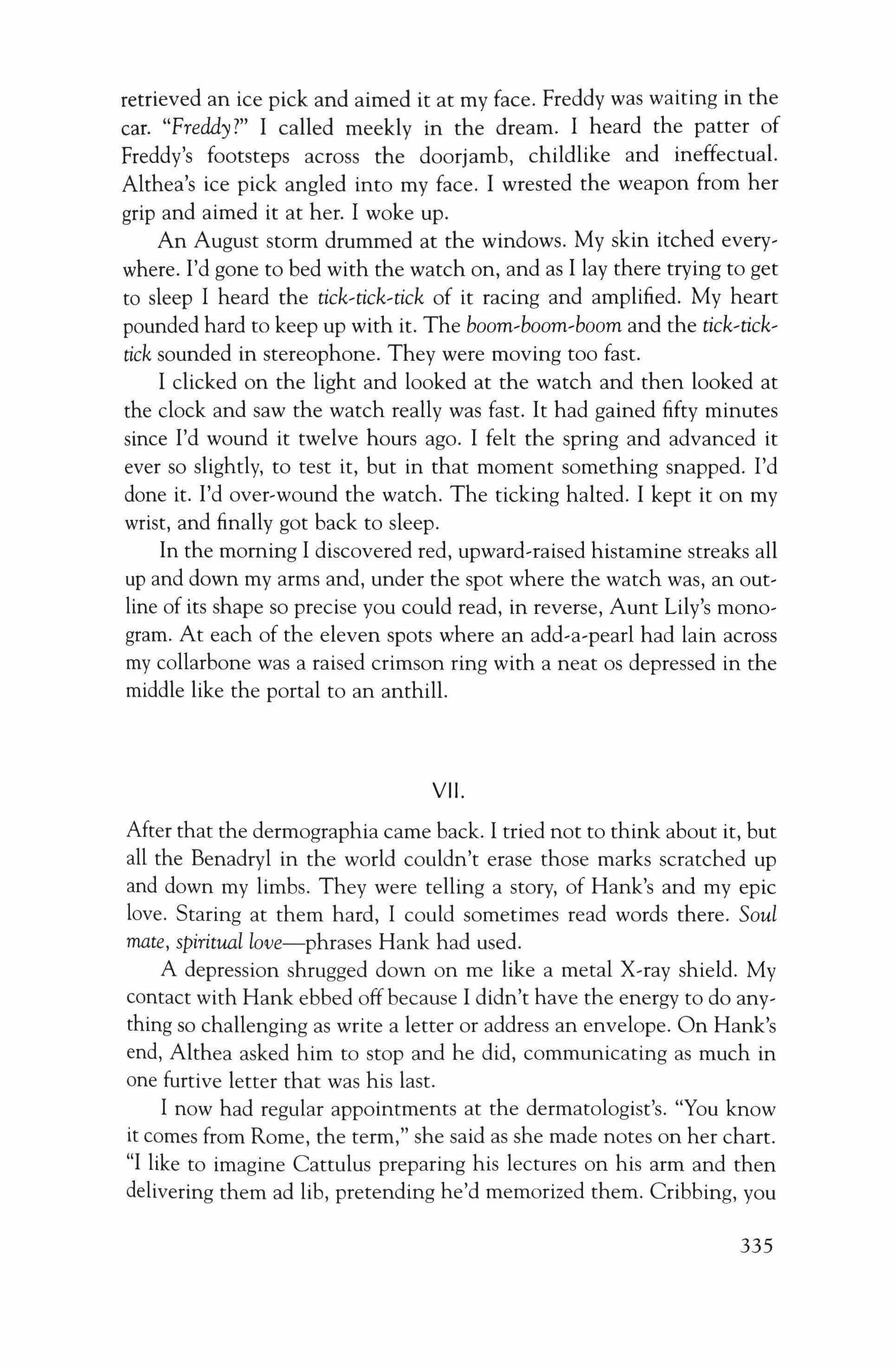
VII.
After that the dermographia came back. I tried not to think about it, but all the Benadryl in the world couldn't erase those marks scratched up and down my limbs. They were telling a story, of Hank's and my epic love. Staring at them hard, I could sometimes read words there. Soul mate, spiritual love-phrases Hank had used.
A depression shrugged down on me like a metal X-ray shield. My contact with Hank ebbed off because I didn't have the energy to do anything so challenging as write a letter or address an envelope. On Hank's end, Althea asked him to stop and he did, communicating as much in one furtive letter that was his last.
I now had regular appointments at the dermatologist's. "You know it comes from Rome, the term," she said as she made notes on her chart. "I like to imagine Cattulus preparing his lectures on his arm and then delivering them ad lib, pretending he'd memorized them. Cribbing, you
335
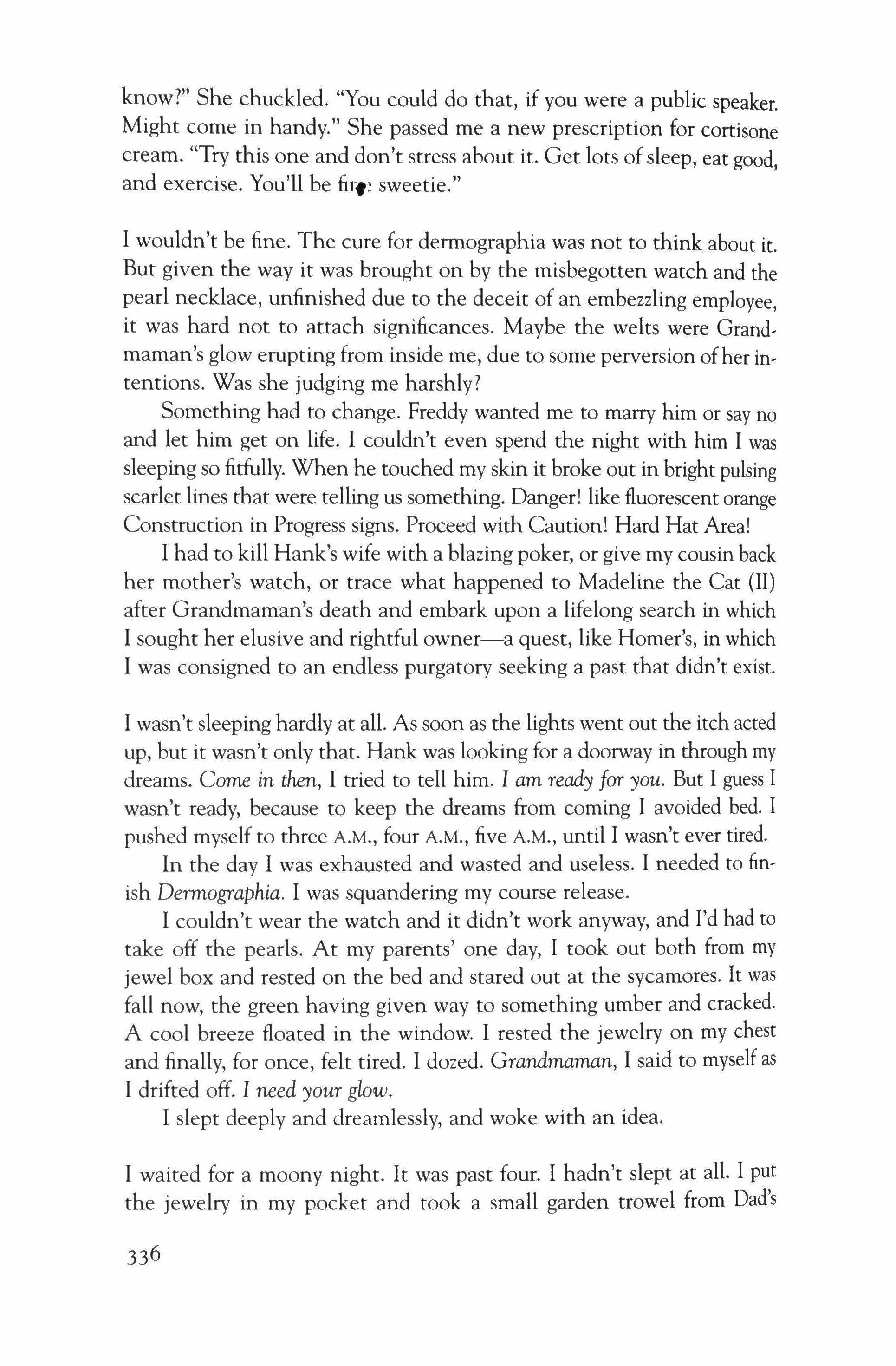
know?" She chuckled. "You could do that, if you were a public speaker. Might come in handy." She passed me a new prescription for cortisone cream. "Try this one and don't stress about it. Get lots ofsleep, eat good, and exercise. You'll be firf� sweetie."
I wouldn't be fine. The cure for dermographia was not to think about it. But given the way it was brought on by the misbegotten watch and the pearl necklace, unfinished due to the deceit of an embezzling employee, it was hard not to attach significances. Maybe the welts were Grandmaman's glow erupting from inside me, due to some perversion ofher intentions. Was she judging me harshly?
Something had to change. Freddy wanted me to marry him or say no and let him get on life. I couldn't even spend the night with him I was sleeping so fitfully. When he touched my skin it broke out in bright pulsing scarlet lines that were telling us something. Danger! like fluorescent orange Construction in Progress signs. Proceed with Caution! Hard Hat Area!
I had to kill Hank's wife with a blazing poker, or give my cousin back her mother's watch, or trace what happened to Madeline the Cat (II) after Grandmaman's death and embark upon a lifelong search in which I sought her elusive and rightful owner-a quest, like Homer's, in which I was consigned to an endless purgatory seeking a past that didn't exist.
I wasn't sleeping hardly at all. As soon as the lights went out the itch acted up, but it wasn't only that. Hank was looking for a doorway in through my dreams. Come in then, I tried to tell him. I am ready for you. But I guess I wasn't ready, because to keep the dreams from coming I avoided bed. I pushed myself to three A.M., four A.M., five A.M., until I wasn't ever tired.
In the day I was exhausted and wasted and useless. I needed to finish Dermographia. I was squandering my course release.
I couldn't wear the watch and it didn't work anyway, and I'd had to take off the pearls. At my parents' one day, I took out both from my jewel box and rested on the bed and stared out at the sycamores. It was fall now, the green having given way to something umber and cracked. A cool breeze floated in the window. I rested the jewelry on my chest and finally, for once, felt tired. I dozed. Grandmaman, I said to myself as I drifted off. I need your glow.
I slept deeply and dreamlessly, and woke with an idea.
I waited for a moony night. It was past four. I hadn't slept at all. I put the jewelry in my pocket and took a small garden trowel from Dad's
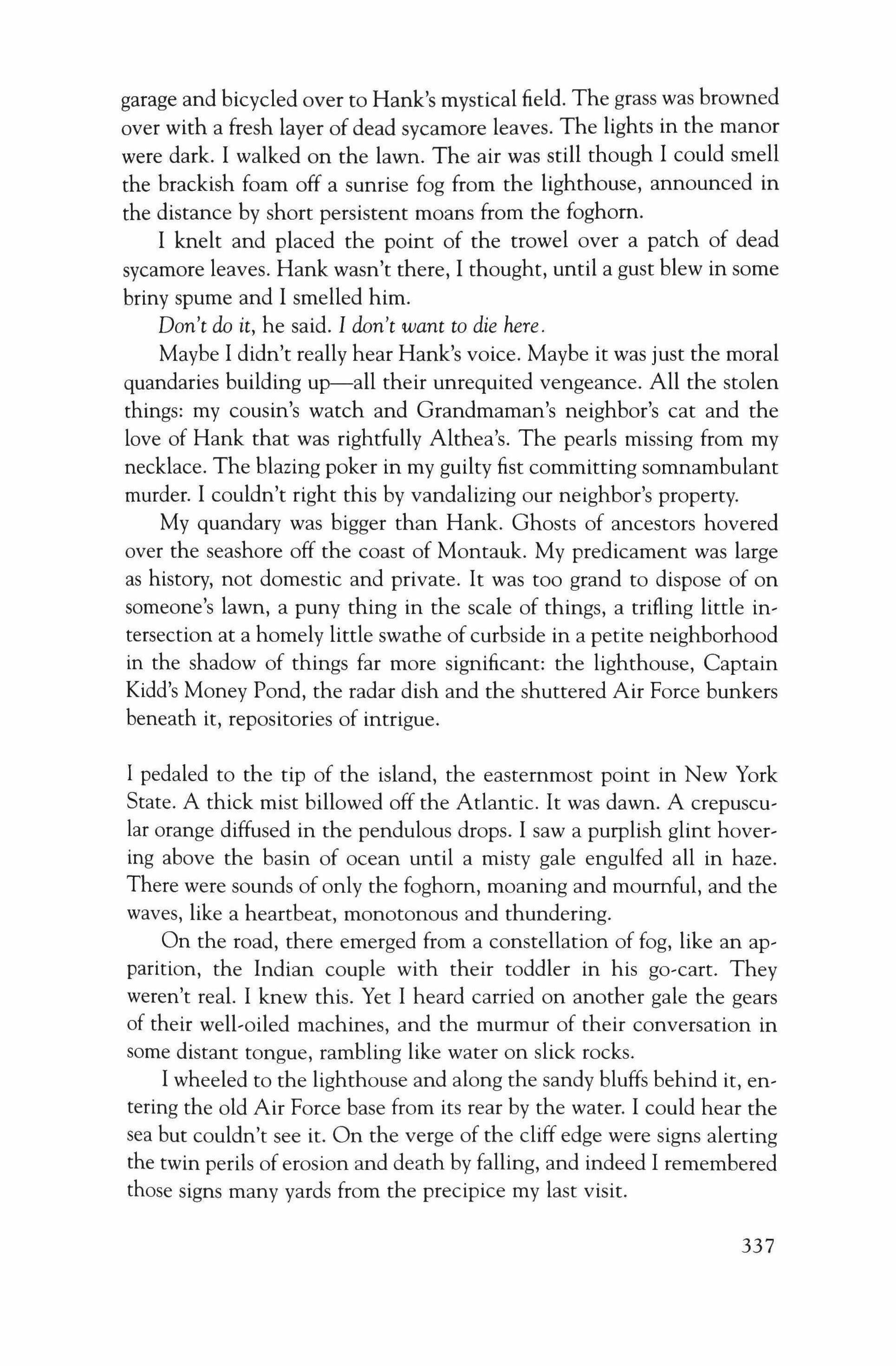
garage and bicycled over to Hank's mystical field. The grass was browned over with a fresh layer of dead sycamore leaves. The lights in the manor were dark. I walked on the lawn. The air was still though I could smell the brackish foam off a sunrise fog from the lighthouse, announced in the distance by short persistent moans from the foghorn.
I knelt and placed the point of the trowel over a patch of dead sycamore leaves. Hank wasn't there, I thought, until a gust blew in some briny spume and I smelled him.
Don't do it, he said. I don't want to die here.
Maybe I didn't really hear Hank's voice. Maybe it was just the moral quandaries building up-all their unrequited vengeance. All the stolen things: my cousin's watch and Grandmaman's neighbor's cat and the love of Hank that was rightfully Althea's. The pearls missing from my necklace. The blazing poker in my guilty fist committing somnambulant murder. I couldn't right this by vandalizing our neighbor's property.
My quandary was bigger than Hank. Ghosts of ancestors hovered over the seashore off the coast of Montauk. My predicament was large as history, not domestic and private. It was too grand to dispose of on someone's lawn, a puny thing in the scale of things, a trifling little intersection at a homely little swathe of curbside in a petite neighborhood in the shadow of things far more significant: the lighthouse, Captain Kidd's Money Pond, the radar dish and the shuttered Air Force bunkers beneath it, repositories of intrigue.
I pedaled to the tip of the island, the easternmost point in New York State. A thick mist billowed off the Atlantic. It was dawn. A crepuscular orange diffused in the pendulous drops. I saw a purplish glint hovering above the basin of ocean until a misty gale engulfed all in haze. There were sounds of only the foghorn, moaning and mournful, and the waves, like a heartbeat, monotonous and thundering.
On the road, there emerged from a constellation of fog, like an apparition, the Indian couple with their toddler in his go-cart. They weren't reaL I knew this. Yet I heard carried on another gale the gears of their well-oiled machines, and the murmur of their conversation in some distant tongue, rambling like water on slick rocks.
I wheeled to the lighthouse and along the sandy bluffs behind it, entering the old Air Force base from its rear by the water. I could hear the sea but couldn't see it. On the verge of the cliff edge were signs alerting the twin perils of erosion and death by falling, and indeed I remembered those signs many yards from the precipice my last visit.
337
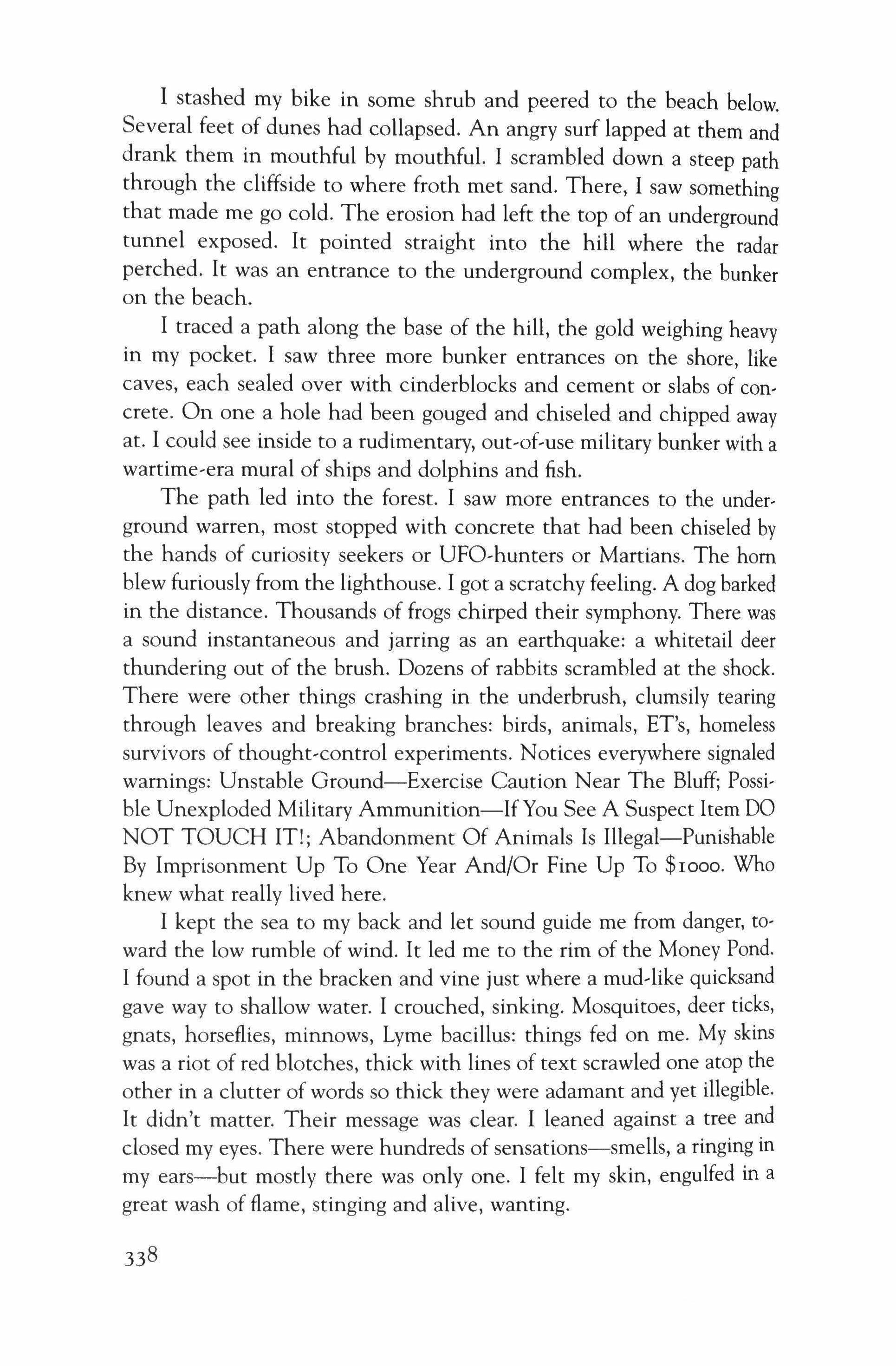
I stashed my bike in some shrub and peered to the beach below. Several feet of dunes had collapsed. An angry surf lapped at them and drank them in mouthful by mouthful. I scrambled down a steep path through the cliffside to where froth met sand. There, I saw something that made me go cold. The erosion had left the top of an underground tunnel exposed. It pointed straight into the hill where the radar perched. It was an entrance to the underground complex, the bunker on the beach.
I traced a path along the base of the hill, the gold weighing heavy in my pocket. I saw three more bunker entrances on the shore, like caves, each sealed over with cinderblocks and cement or slabs of concrete. On one a hole had been gouged and chiseled and chipped away at. I could see inside to a rudimentary, out-of-use military bunker with a wartime-era mural of ships and dolphins and fish.
The path led into the forest. I saw more entrances to the underground warren, most stopped with concrete that had been chiseled by the hands of curiosity seekers or UFO-hunters or Martians. The hom blew furiously from the lighthouse. I got a scratchy feeling. A dog barked in the distance. Thousands of frogs chirped their symphony. There was a sound instantaneous and jarring as an earthquake: a whitetail deer thundering out of the brush. Dozens of rabbits scrambled at the shock. There were other things crashing in the underbrush, clumsily tearing through leaves and breaking branches: birds, animals, ET's, homeless survivors of thought-control experiments. Notices everywhere signaled warnings: Unstable Ground-Exercise Caution Near The Bluff; Possible Unexploded Military Ammunition-If You See A Suspect Item DO NOT TOUCH IT!; Abandonment Of Animals Is Illegal-Punishable By Imprisonment Up To One Year And/Or Fine Up To $1000. Who knew what really lived here.
I kept the sea to my back and let sound guide me from danger, toward the low rumble of wind. It led me to the rim of the Money Pond. I found a spot in the bracken and vine just where a mud-like quicksand gave way to shallow water. I crouched, sinking. Mosquitoes, deer ticks, gnats, horseflies, minnows, Lyme bacillus: things fed on me. My skins was a riot of red blotches, thick with lines of text scrawled one atop the other in a clutter of words so thick they were adamant and yet illegible. It didn't matter. Their message was clear. I leaned against a tree and closed my eyes. There were hundreds of sensations-smells, a ringing in my ears-but mostly there was only one. I felt my skin, engulfed in a great wash of flame, stinging and alive, wanting.

It is said that dermographia is a condition of the body trying to keep things within it. Swelling and red hives close off pores, thwarting the natural sweating process and relieving of toxins. In ancient Rome they believed it was linked to a kind of a psychological and even sexual withholding, and associated it with impotence in men, anorgasmia in women.
My case was different, I understood this now. My skin was trying to let something out. There was too much to say. Words came tumbling out in an aphasic jumble. All that could be discerned was a histamine swell, inarticulate and loud.
Up to my knees in quicksand, I wanted to scream, and I did. It echoed long, floated through the mist and joined over the ocean with bleats from the foghorn. Together they created a faint lowing, audible all the way to the city of Montauk.
* * *
339
Karen Brown
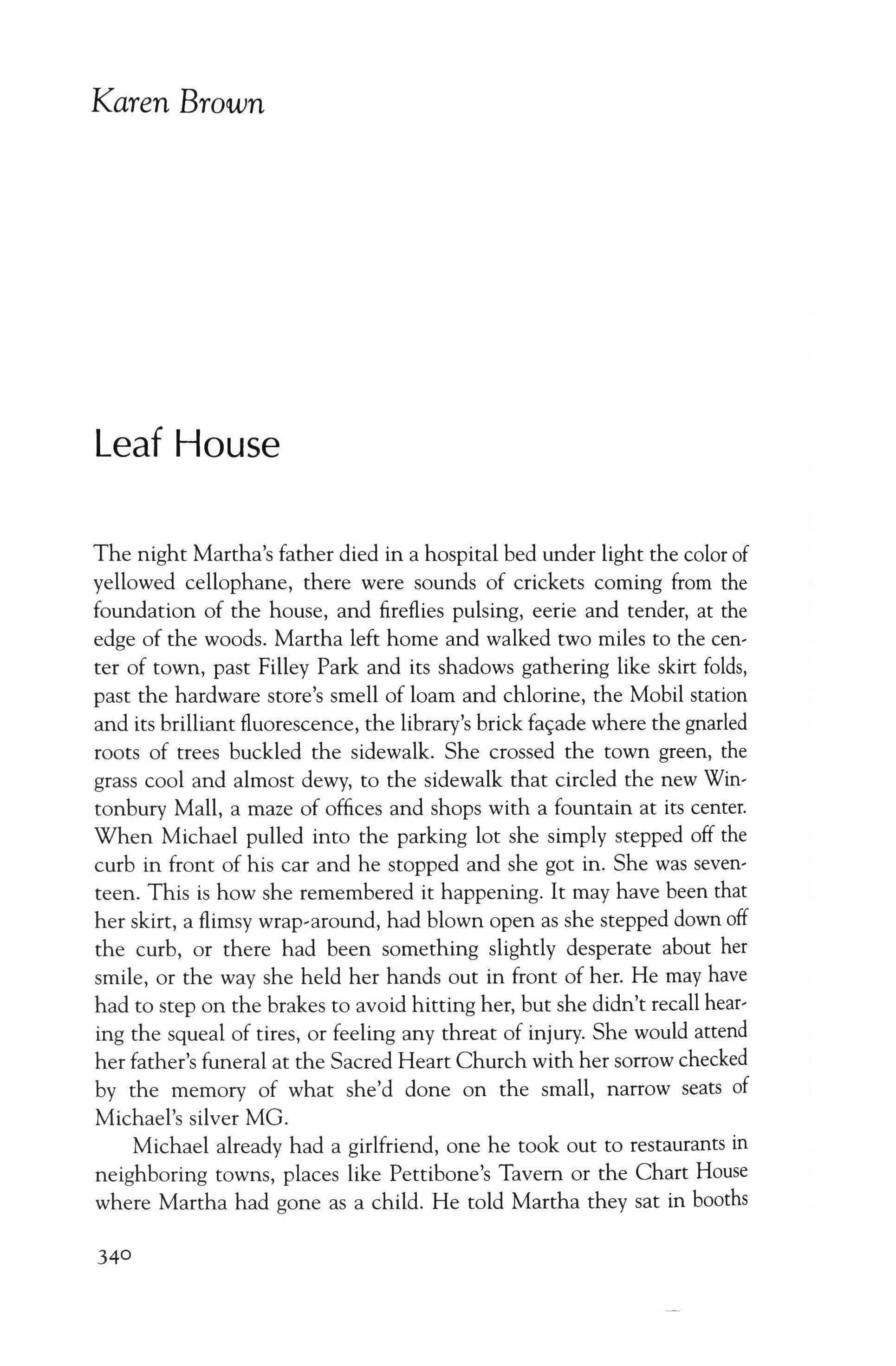
Leaf House
The night Martha's father died in a hospital bed under light the color of yellowed cellophane, there were sounds of crickets coming from the foundation of the house, and fireflies pulsing, eerie and tender, at the edge of the woods. Martha left home and walked two miles to the center of town, past Filley Park and its shadows gathering like skirt folds, past the hardware store's smell of loam and chlorine, the Mobil station and its brilliant fluorescence, the library's brick facade where the gnarled roots of trees buckled the sidewalk. She crossed the town green, the grass cool and almost dewy, to the sidewalk that circled the new Wintonbury Mall, a maze of offices and shops with a fountain at its center. When Michael pulled into the parking lot she simply stepped off the curb in front of his car and he stopped and she got in. She was seventeen. This is how she remembered it happening. It may have been that her skirt, a flimsy wrap-around, had blown open as she stepped down off the curb, or there had been something slightly desperate about her smile, or the way she held her hands out in front of her. He may have had to step on the brakes to avoid hitting her, but she didn't recall hearing the squeal of tires, or feeling any threat of injury. She would attend her father's funeral at the Sacred Heart Church with her sorrow checked by the memory of what she'd done on the small, narrow seats of Michael's silver MG.
Michael already had a girlfriend, one he took out to restaurants in neighboring towns, places like Pettibone's Tavern or the Chart House where Martha had gone as a child. He told Martha they sat in booths
340
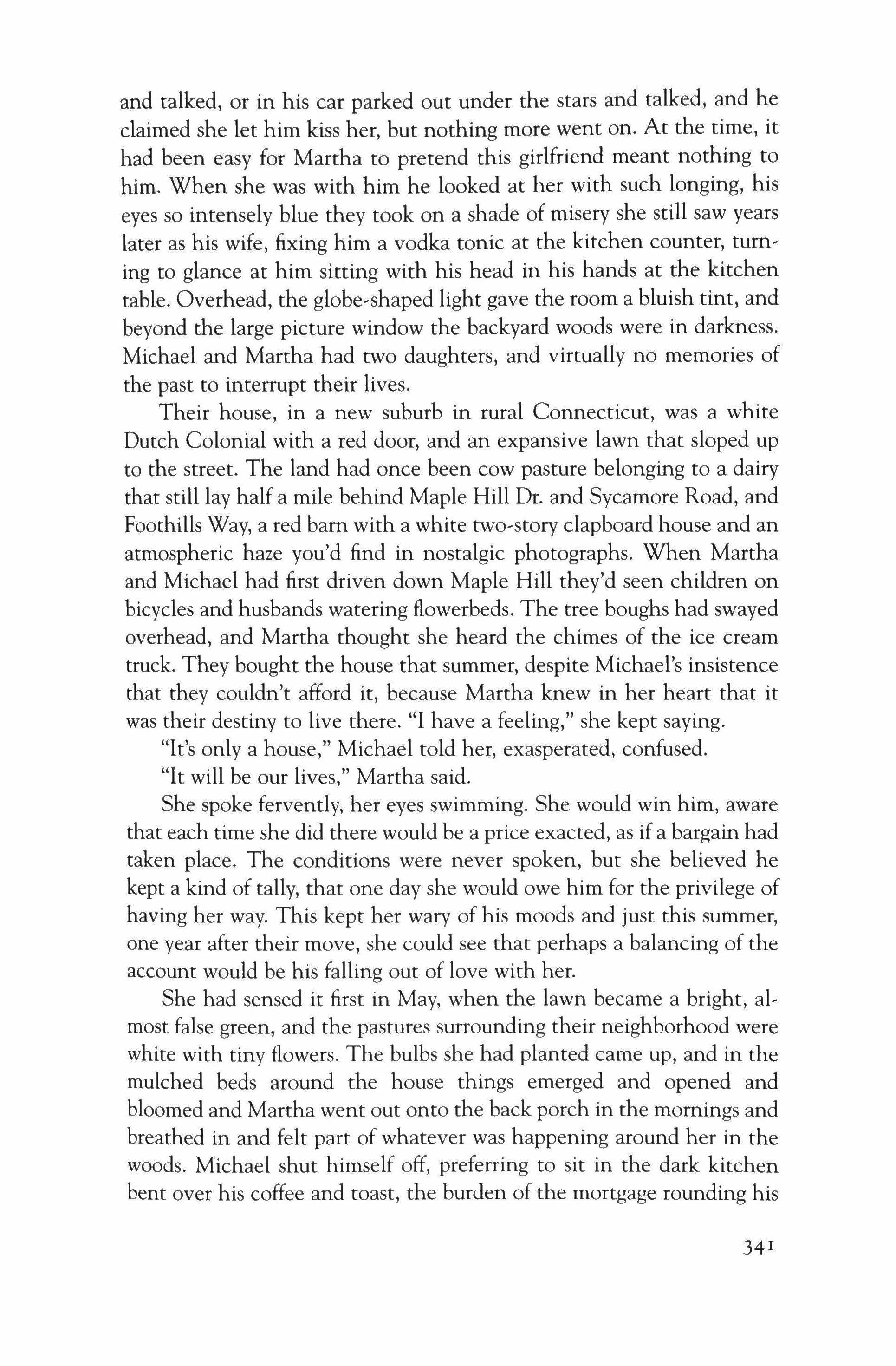
and talked, or in his car parked out under the stars and talked, and he claimed she let him kiss her, but nothing more went on. At the time, it had been easy for Martha to pretend this girlfriend meant nothing to him. When she was with him he looked at her with such longing, his eyes so intensely blue they took on a shade of misery she still saw years later as his wife, fixing him a vodka tonic at the kitchen counter, turning to glance at him sitting with his head in his hands at the kitchen table. Overhead, the globe-shaped light gave the room a bluish tint, and beyond the large picture window the backyard woods were in darkness. Michael and Martha had two daughters, and virtually no memories of the past to interrupt their lives.
Their house, in a new suburb in rural Connecticut, was a white Dutch Colonial with a red door, and an expansive lawn that sloped up to the street. The land had once been cow pasture belonging to a dairy that still lay half a mile behind Maple Hill Dr. and Sycamore Road, and Foothills Way, a red barn with a white two-story clapboard house and an atmospheric haze you'd find in nostalgic photographs. When Martha and Michael had first driven down Maple Hill they'd seen children on bicycles and husbands watering flowerbeds. The tree boughs had swayed overhead, and Martha thought she heard the chimes of the ice cream truck. They bought the house that summer, despite Michael's insistence that they couldn't afford it, because Martha knew in her heart that it was their destiny to live there. "I have a feeling," she kept saying.
"It's only a house," Michael told her, exasperated, confused.
"It will be our lives," Martha said.
She spoke fervently, her eyes swimming. She would win him, aware that each time she did there would be a price exacted, as if a bargain had taken place. The conditions were never spoken, but she believed he kept a kind of tally, that one day she would owe him for the privilege of having her way. This kept her wary of his moods and just this summer, one year after their move, she could see that perhaps a balancing of the account would be his falling out of love with her.
She had sensed it first in May, when the lawn became a bright, almost false green, and the pastures surrounding their neighborhood were white with tiny flowers. The bulbs she had planted came up, and in the mulched beds around the house things emerged and opened and bloomed and Martha went out onto the back porch in the mornings and breathed in and felt part of whatever was happening around her in the woods. Michael shut himself off, preferring to sit in the dark kitchen bent over his coffee and toast, the burden of the mortgage rounding his
341
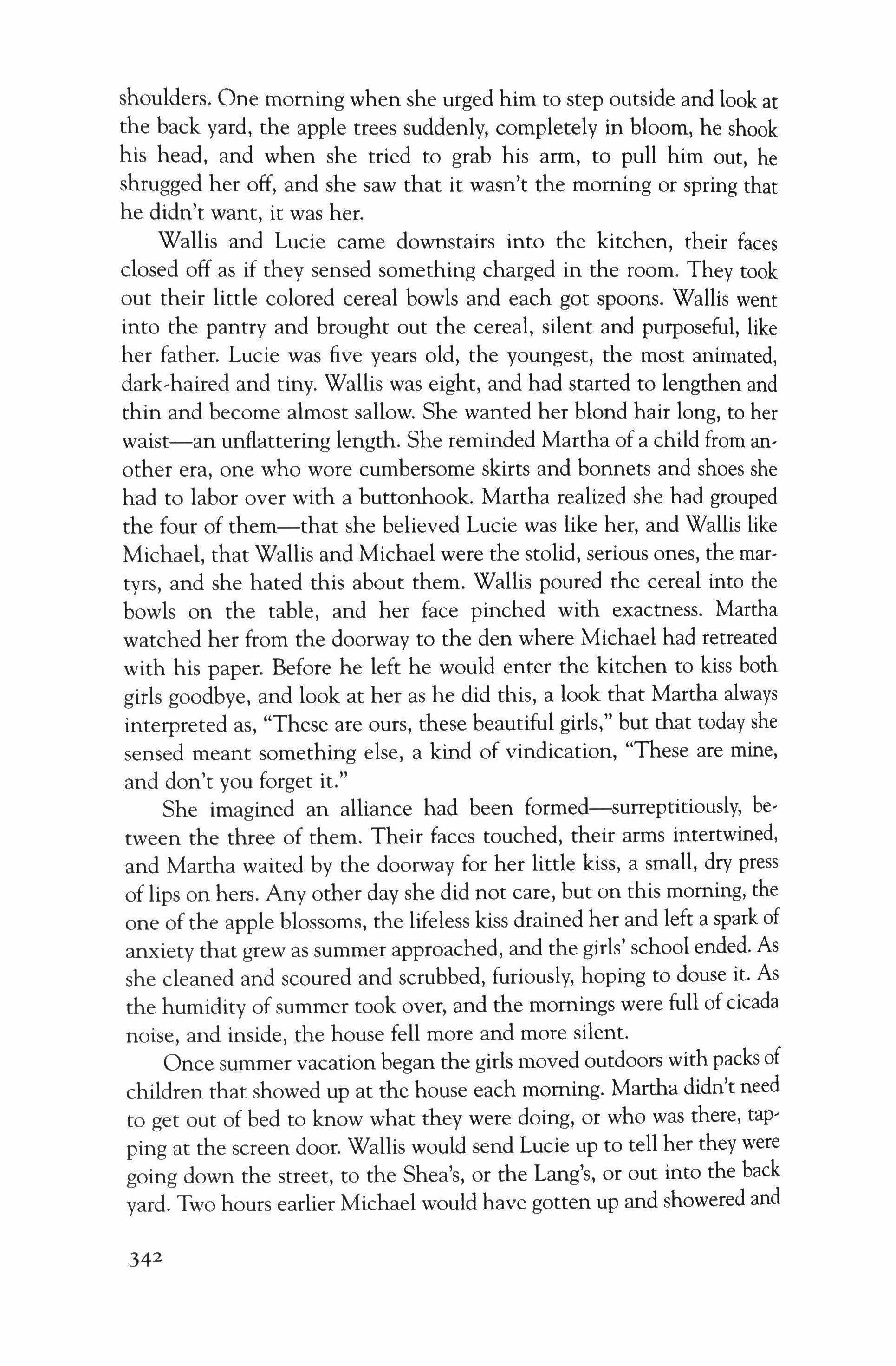
shoulders. One morning when she urged him to step outside and look at the back yard, the apple trees suddenly, completely in bloom, he shook his head, and when she tried to grab his arm, to pull him out, he shrugged her off, and she saw that it wasn't the morning or spring that he didn't want, it was her.
Wallis and Lucie came downstairs into the kitchen, their faces closed off as if they sensed something charged in the room. They took out their little colored cereal bowls and each got spoons. Wallis went into the pantry and brought out the cereal, silent and purposeful, like her father. Lucie was five years old, the youngest, the most animated, dark-haired and tiny. Wallis was eight, and had started to lengthen and thin and become almost sallow. She wanted her blond hair long, to her waist-an unflattering length. She reminded Martha of a child from another era, one who wore cumbersome skirts and bonnets and shoes she had to labor over with a buttonhook. Martha realized she had grouped the four of them-that she believed Lucie was like her, and Wallis like Michael, that Wallis and Michael were the stolid, serious ones, the martyrs, and she hated this about them. Wallis poured the cereal into the bowls on the table, and her face pinched with exactness. Martha watched her from the doorway to the den where Michael had retreated with his paper. Before he left he would enter the kitchen to kiss both girls goodbye, and look at her as he did this, a look that Martha always interpreted as, "These are ours, these beautiful girls," but that today she sensed meant something else, a kind of vindication, "These are mine, and don't you forget it."
She imagined an alliance had been formed-surreptitiously, between the three of them. Their faces touched, their arms intertwined, and Martha waited by the doorway for her little kiss, a small, dry press of lips on hers. Any other day she did not care, but on this morning, the one of the apple blossoms, the lifeless kiss drained her and left a spark of anxiety that grew as summer approached, and the girls' school ended. As she cleaned and scoured and scrubbed, furiously, hoping to douse it. As the humidity of summer took over, and the mornings were full ofcicada noise, and inside, the house fell more and more silent.
Once summer vacation began the girls moved outdoors with packs of children that showed up at the house each morning. Martha didn't need to get out of bed to know what they were doing, or who was there, tapping at the screen door. Wallis would send Lucie up to tell her they were going down the street, to the Shea's, or the Lang's, or out into the back yard. Two hours earlier Michael would have gotten up and showered and
342
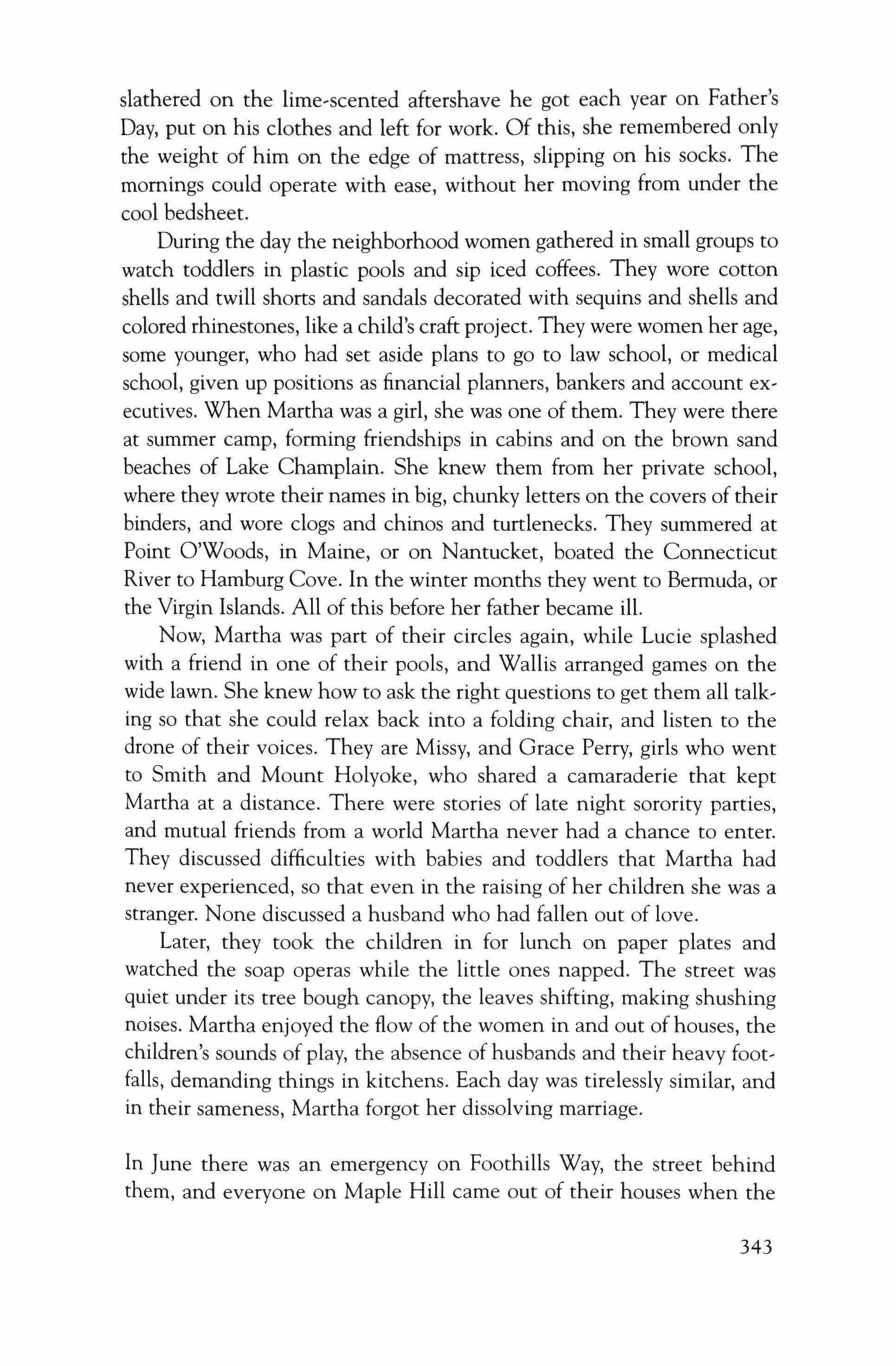
slathered on the lime,scented aftershave he got each year on Father's Day, put on his clothes and left for work. Of this, she remembered only the weight of him on the edge of mattress, slipping on his socks. The mornings could operate with ease, without her moving from under the cool bedsheet.
During the day the neighborhood women gathered in small groups to watch toddlers in plastic pools and sip iced coffees. They wore cotton shells and twill shorts and sandals decorated with sequins and shells and colored rhinestones, like a child's craft project. They were women her age, some younger, who had set aside plans to go to law school, or medical school, given up positions as financial planners, bankers and account ex, ecutives. When Martha was a girl, she was one of them. They were there at summer camp, forming friendships in cabins and on the brown sand beaches of Lake Champlain. She knew them from her private school, where they wrote their names in big, chunky letters on the covers of their binders, and wore clogs and chinos and turtlenecks. They summered at Point O'Woods, in Maine, or on Nantucket, boated the Connecticut River to Hamburg Cove. In the winter months they went to Bermuda, or the Virgin Islands. All of this before her father became ill.
Now, Martha was part of their circles again, while Lucie splashed with a friend in one of their pools, and Wallis arranged games on the wide lawn. She knew how to ask the right questions to get them all talk, ing so that she could relax back into a folding chair, and listen to the drone of their voices. They are Missy, and Grace Perry, girls who went to Smith and Mount Holyoke, who shared a camaraderie that kept Martha at a distance. There were stories of late night sorority parties, and mutual friends from a world Martha never had a chance to enter. They discussed difficulties with babies and toddlers that Martha had never experienced, so that even in the raising of her children she was a stranger. None discussed a husband who had fallen out of love.
Later, they took the children in for lunch on paper plates and watched the soap operas while the little ones napped. The street was quiet under its tree bough canopy, the leaves shifting, making shushing noises. Martha enjoyed the flow of the women in and out of houses, the children's sounds of play, the absence of husbands and their heavy foot, falls, demanding things in kitchens. Each day was tirelessly similar, and in their sameness, Martha forgot her dissolving marriage.
In June there was an emergency on Foothills Way, the street behind them, and everyone on Maple Hill came out of their houses when the
343
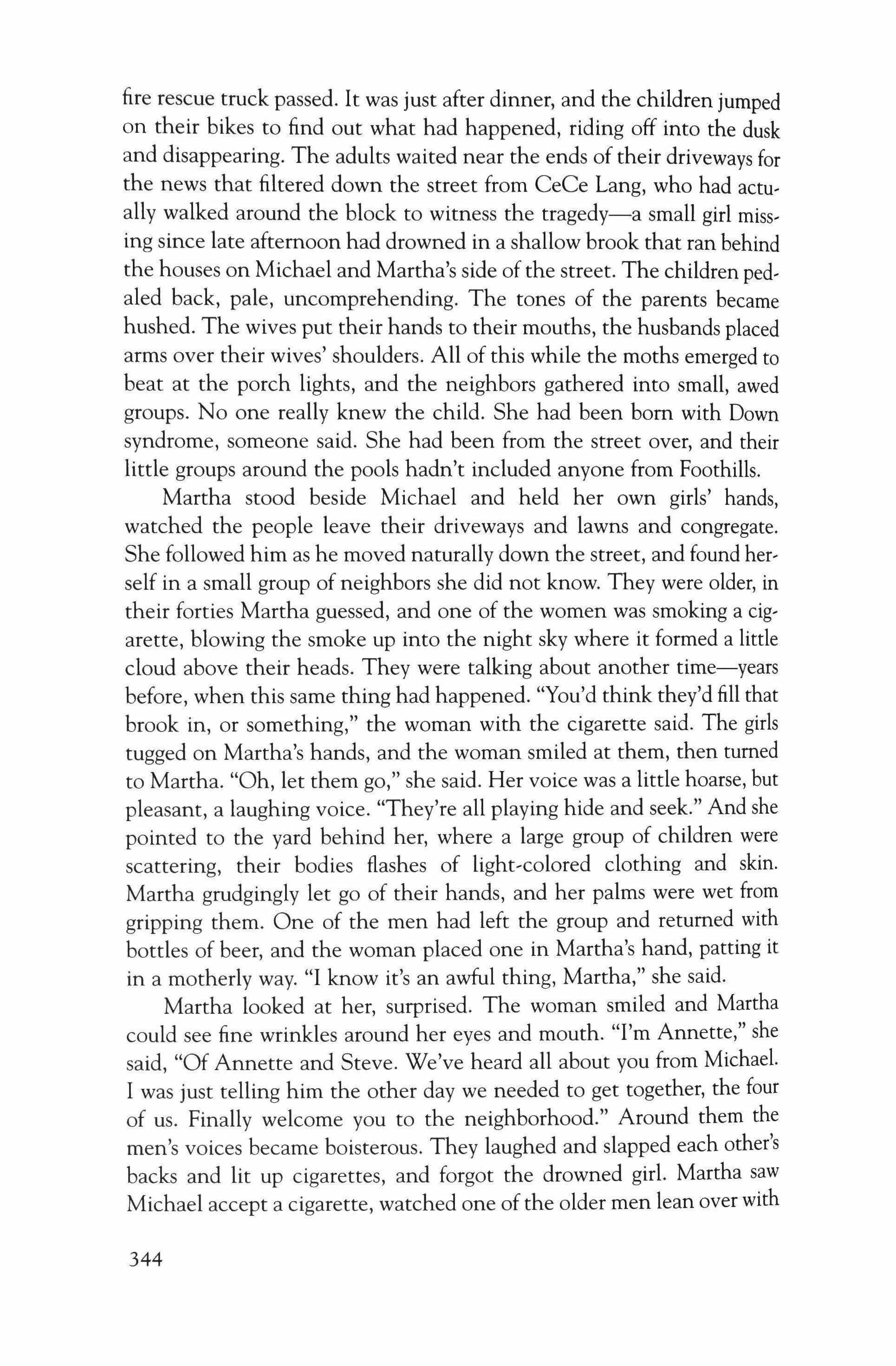
fire rescue truck passed. It was just after dinner, and the children jumped on their bikes to find out what had happened, riding off into the dusk and disappearing. The adults waited near the ends of their driveways for the news that filtered down the street from CeCe Lang, who had actually walked around the block to witness the tragedy-a small girl missing since late afternoon had drowned in a shallow brook that ran behind the houses on Michael and Martha's side of the street. The children pedaled back, pale, uncomprehending. The tones of the parents became hushed. The wives put their hands to their mouths, the husbands placed arms over their wives' shoulders. All of this while the moths emerged to beat at the porch lights, and the neighbors gathered into small, awed groups. No one really knew the child. She had been born with Down syndrome, someone said. She had been from the street over, and their little groups around the pools hadn't included anyone from Foothills.
Martha stood beside Michael and held her own girls' hands, watched the people leave their driveways and lawns and congregate. She followed him as he moved naturally down the street, and found herself in a small group of neighbors she did not know. They were older, in their forties Martha guessed, and one of the women was smoking a cigarette, blowing the smoke up into the night sky where it formed a little cloud above their heads. They were talking about another time-years before, when this same thing had happened. "You'd think they'd fill that brook in, or something," the woman with the cigarette said. The girls tugged on Martha's hands, and the woman smiled at them, then turned to Martha. "Oh, let them go," she said. Her voice was a little hoarse, but pleasant, a laughing voice. "They're all playing hide and seek." And she pointed to the yard behind her, where a large group of children were scattering, their bodies flashes of light-colored clothing and skin. Martha grudgingly let go of their hands, and her palms were wet from gripping them. One of the men had left the group and returned with bottles of beer, and the woman placed one in Martha's hand, patting it in a motherly way. "I know it's an awful thing, Martha," she said.
Martha looked at her, surprised. The woman smiled and Martha could see fine wrinkles around her eyes and mouth. "I'm Annette," she said, "Of Annette and Steve. We've heard all about you from Michael. I was just telling him the other day we needed to get together, the four of us. Finally welcome you to the neighborhood." Around them the men's voices became boisterous. They laughed and slapped each other's backs and lit up cigarettes, and forgot the drowned girl. Martha saw Michael accept a cigarette, watched one of the older men lean over with
344
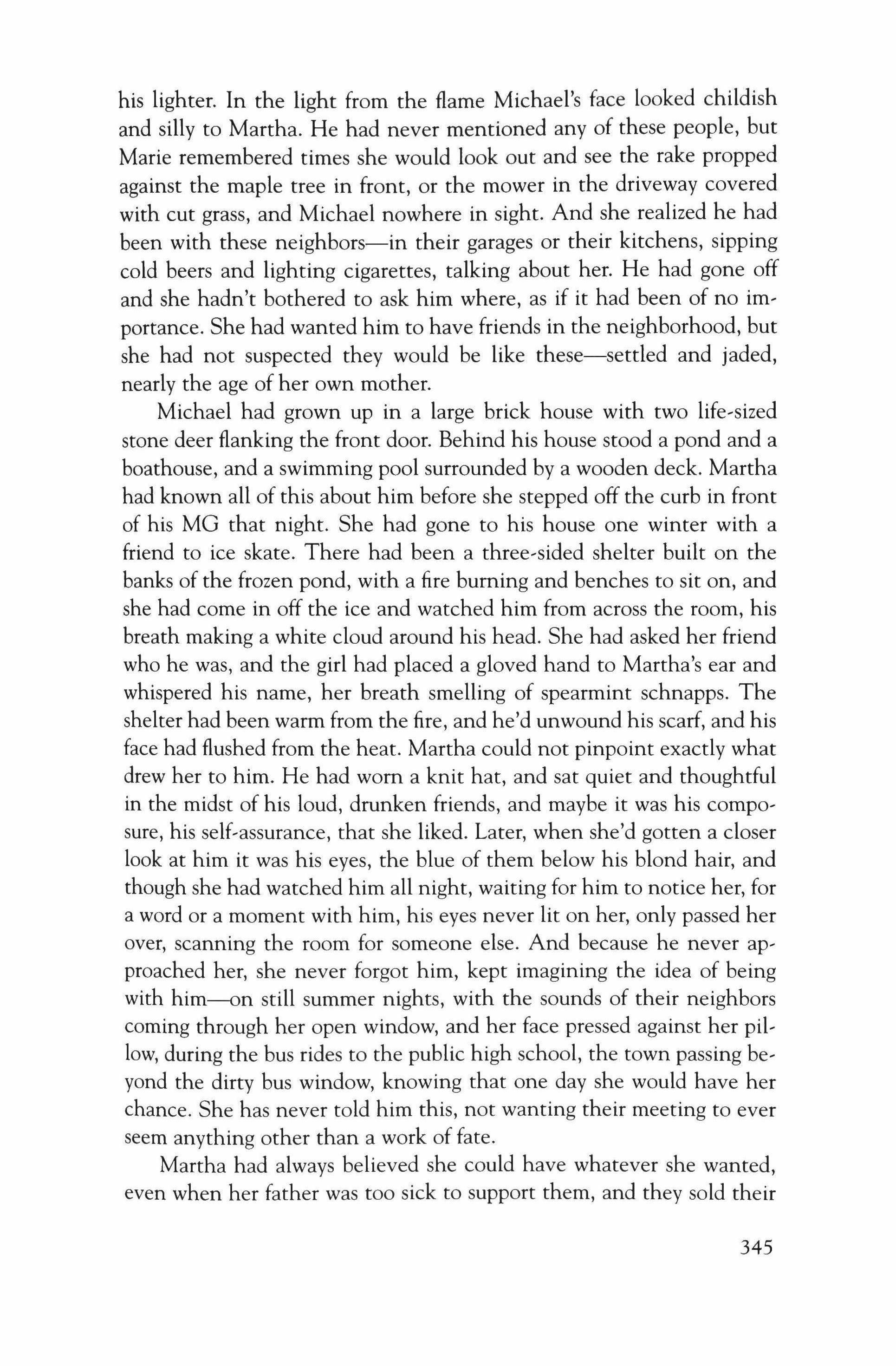
his lighter. In the light from the flame Michael's face looked childish and silly to Martha. He had never mentioned any of these people, but Marie remembered times she would look out and see the rake propped against the maple tree in front, or the mower in the driveway covered with cut grass, and Michael nowhere in sight. And she realized he had been with these neighbors-in their garages or their kitchens, sipping cold beers and lighting cigarettes, talking about her. He had gone off and she hadn't bothered to ask him where, as if it had been of no importance. She had wanted him to have friends in the neighborhood, but she had not suspected they would be like these-settled and jaded, nearly the age of her own mother.
Michael had grown up in a large brick house with two life-sized stone deer flanking the front door. Behind his house stood a pond and a boathouse, and a swimming pool surrounded by a wooden deck. Martha had known all of this about him before she stepped off the curb in front of his MG that night. She had gone to his house one winter with a friend to ice skate. There had been a three-sided shelter built on the banks of the frozen pond, with a fire burning and benches to sit on, and she had come in off the ice and watched him from across the room, his breath making a white cloud around his head. She had asked her friend who he was, and the girl had placed a gloved hand to Martha's ear and whispered his name, her breath smelling of spearmint schnapps. The shelter had been warm from the fire, and he'd unwound his scarf, and his face had flushed from the heat. Martha could not pinpoint exactly what drew her to him. He had worn a knit hat, and sat quiet and thoughtful in the midst of his loud, drunken friends, and maybe it was his composure, his self-assurance, that she liked. Later, when she'd gotten a closer look at him it was his eyes, the blue of them below his blond hair, and though she had watched him all night, waiting for him to notice her, for a word or a moment with him, his eyes never lit on her, only passed her over, scanning the room for someone else. And because he never approached her, she never forgot him, kept imagining the idea of being with him-on still summer nights, with the sounds of their neighbors coming through her open window, and her face pressed against her pillow, during the bus rides to the public high school, the town passing beyond the dirty bus window, knowing that one day she would have her chance. She has never told him this, not wanting their meeting to ever seem anything other than a work of fate.
Martha had always believed she could have whatever she wanted, even when her father was too sick to support them, and they sold their
345
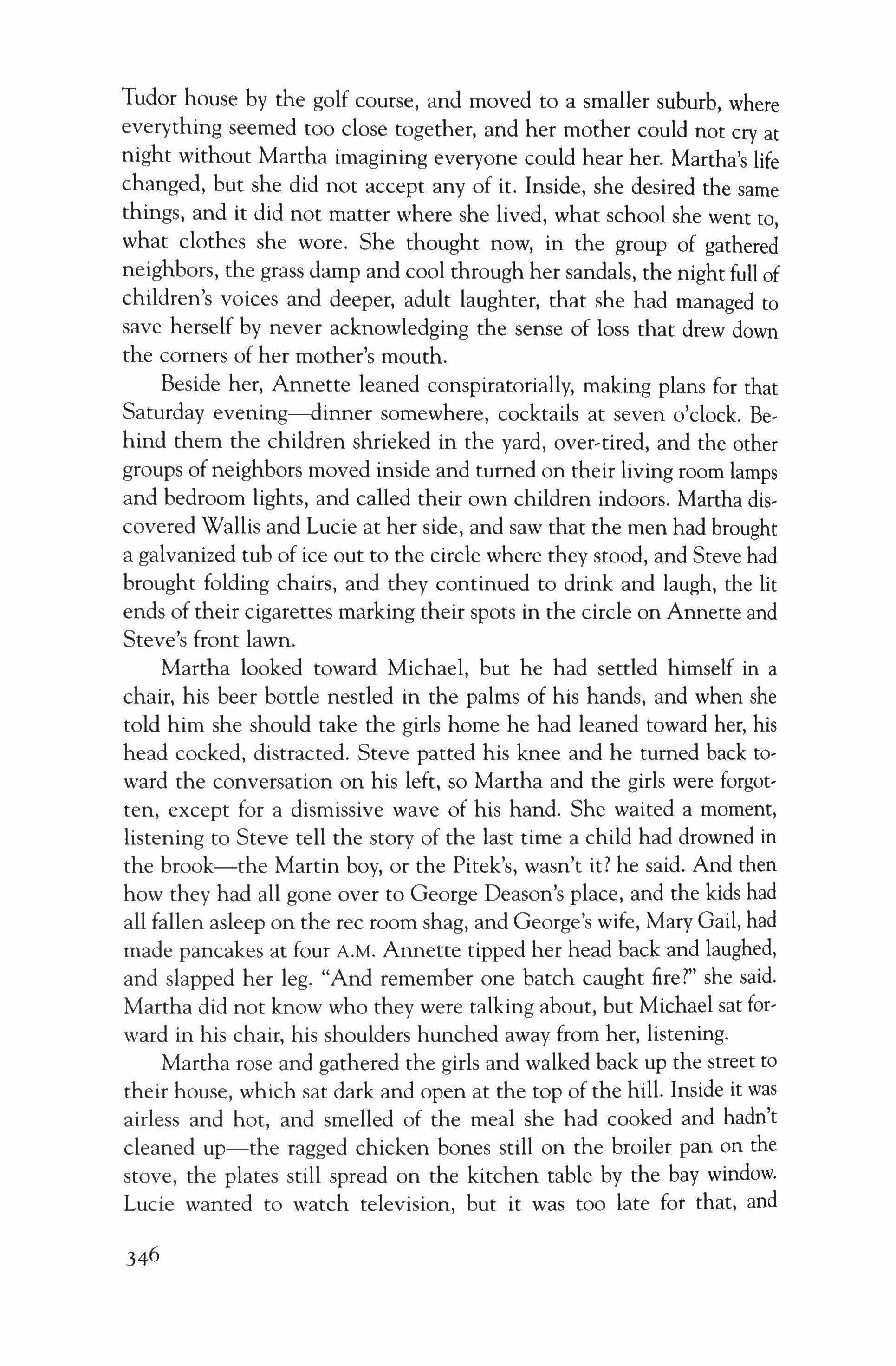
Tudor house by the golf course, and moved to a smaller suburb, where everything seemed too close together, and her mother could not cry at night without Martha imagining everyone could hear her. Martha's life changed, but she did not accept any of it. Inside, she desired the same things, and it did not matter where she lived, what school she went to what clothes she wore. She thought now, in the group of gathered neighbors, the grass damp and cool through her sandals, the night full of children's voices and deeper, adult laughter, that she had managed to save herself by never acknowledging the sense of loss that drew down the comers of her mother's mouth.
Beside her, Annette leaned conspiratorially, making plans for that Saturday evening---dinner somewhere, cocktails at seven o'clock. Behind them the children shrieked in the yard, over-tired, and the other groups of neighbors moved inside and turned on their living room lamps and bedroom lights, and called their own children indoors. Martha discovered Wallis and Lucie at her side, and saw that the men had brought a galvanized tub of ice out to the circle where they stood, and Steve had brought folding chairs, and they continued to drink and laugh, the lit ends of their cigarettes marking their spots in the circle on Annette and Steve's front lawn.
Martha looked toward Michael, but he had settled himself in a chair, his beer bottle nestled in the palms of his hands, and when she told him she should take the girls home he had leaned toward her, his head cocked, distracted. Steve patted his knee and he turned back toward the conversation on his left, so Martha and the girls were forgotten, except for a dismissive wave of his hand. She waited a moment, listening to Steve tell the story of the last time a child had drowned in the brook-the Martin boy, or the Pitek's, wasn't it? he said. And then how they had all gone over to George Deason's place, and the kids had all fallen asleep on the rec room shag, and George's wife, Mary Gail, had made pancakes at four A.M. Annette tipped her head back and laughed, and slapped her leg. "And remember one batch caught fire?" she said. Martha did not know who they were talking about, but Michael sat forward in his chair, his shoulders hunched away from her, listening.
Martha rose and gathered the girls and walked back up the street to their house, which sat dark and open at the top of the hill. Inside it was airless and hot, and smelled of the meal she had cooked and hadn't cleaned up-the ragged chicken bones still on the broiler pan on the stove, the plates still spread on the kitchen table by the bay window. Lucie wanted to watch television, but it was too late for that, and
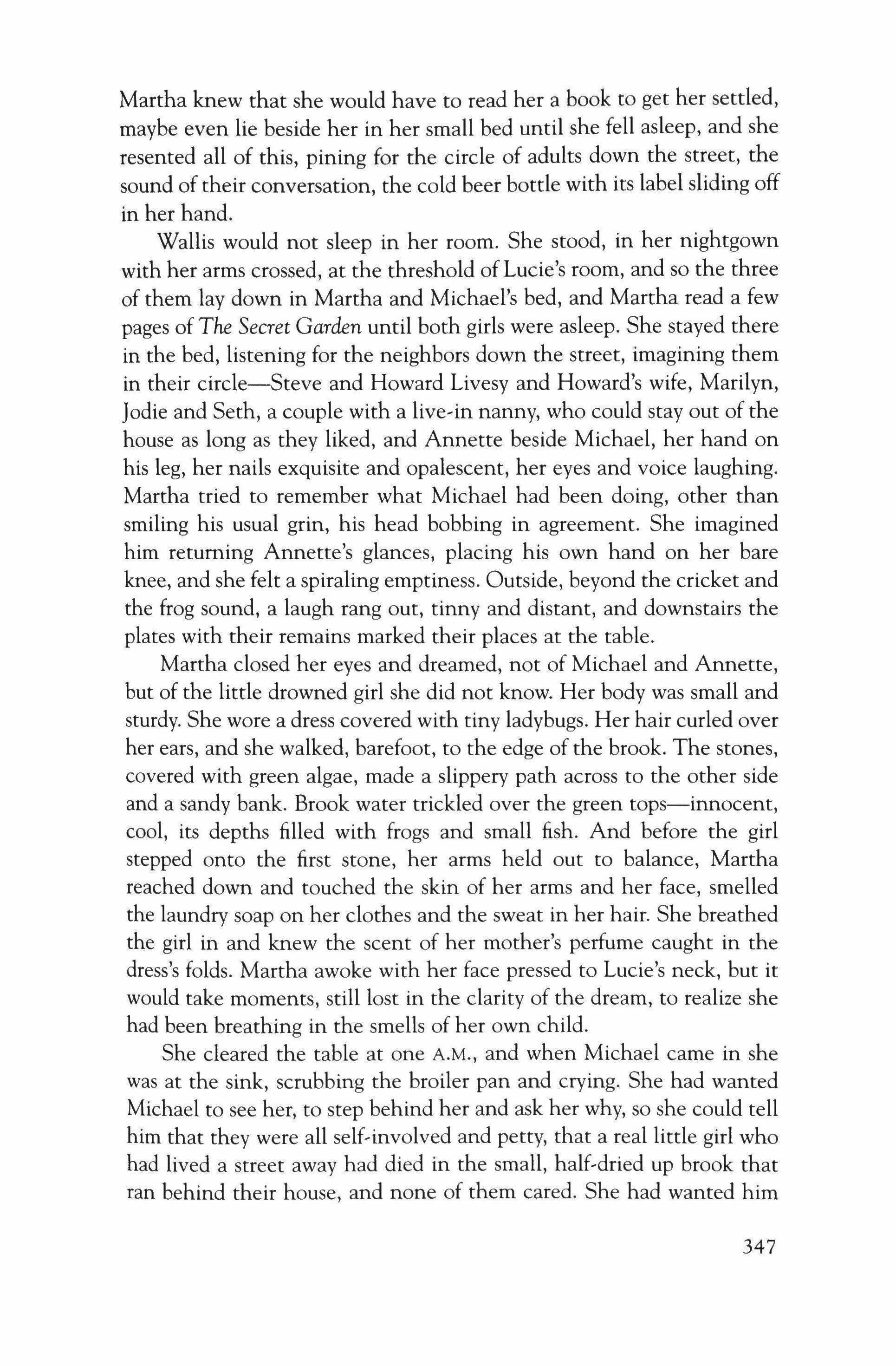
Martha knew that she would have to read her a book to get her settled, maybe even lie beside her in her small bed until she fell asleep, and she resented all of this, pining for the circle of adults down the street, the sound of their conversation, the cold beer bottle with its label sliding off in her hand.
Wallis would not sleep in her room. She stood, in her nightgown with her arms crossed, at the threshold of Lucie's room, and so the three of them lay down in Martha and Michael's bed, and Martha read a few pages of The Secret Garden until both girls were asleep. She stayed there in the bed, listening for the neighbors down the street, imagining them in their circle-Steve and Howard Livesy and Howard's wife, Marilyn, Jodie and Seth, a couple with a live-in nanny, who could stay out of the house as long as they liked, and Annette beside Michael, her hand on his leg, her nails exquisite and opalescent, her eyes and voice laughing. Martha tried to remember what Michael had been doing, other than smiling his usual grin, his head bobbing in agreement. She imagined him returning Annette's glances, placing his own hand on her bare knee, and she felt a spiraling emptiness. Outside, beyond the cricket and the frog sound, a laugh rang out, tinny and distant, and downstairs the plates with their remains marked their places at the table.
Martha closed her eyes and dreamed, not of Michael and Annette, but of the little drowned girl she did not know. Her body was small and sturdy. She wore a dress covered with tiny ladybugs. Her hair curled over her ears, and she walked, barefoot, to the edge of the brook. The stones, covered with green algae, made a slippery path across to the other side and a sandy bank. Brook water trickled over the green tops-innocent, cool, its depths filled with frogs and small fish. And before the girl stepped onto the first stone, her arms held out to balance, Martha reached down and touched the skin of her arms and her face, smelled the laundry soap on her clothes and the sweat in her hair. She breathed the girl in and knew the scent of her mother's perfume caught in the dress's folds. Martha awoke with her face pressed to Lucie's neck, but it would take moments, still lost in the clarity of the dream, to realize she had been breathing in the smells of her own child.
She cleared the table at one A.M., and when Michael came in she was at the sink, scrubbing the broiler pan and crying. She had wanted Michael to see her, to step behind her and ask her why, so she could tell him that they were all self-involved and petty, that a real little girl who had lived a street away had died in the small, half-dried up brook that ran behind their house, and none of them cared. She had wanted him
347
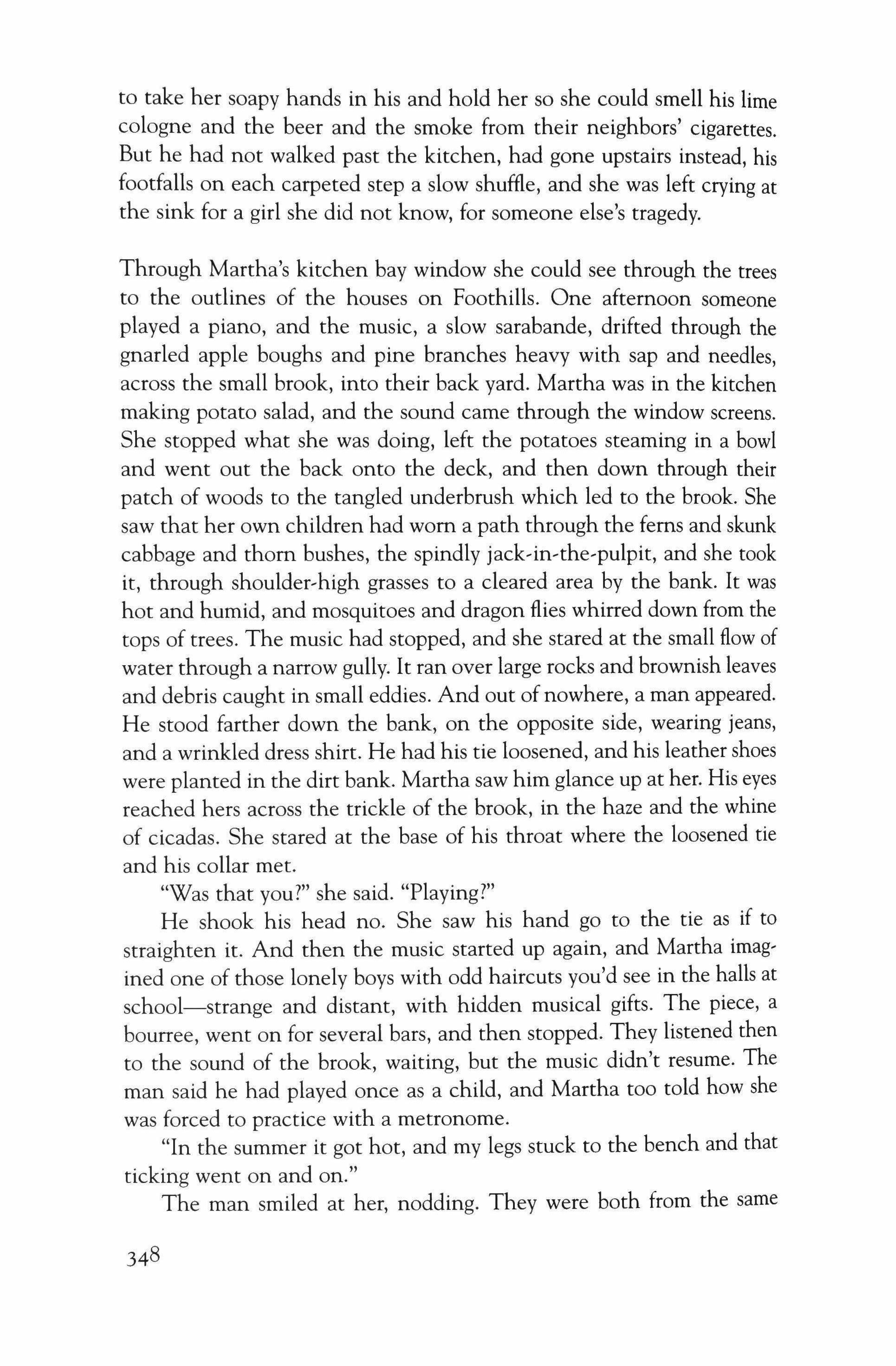
to take her soapy hands in his and hold her so she could smell his lime cologne and the beer and the smoke from their neighbors' cigarettes. But he had not walked past the kitchen, had gone upstairs instead, his footfalls on each carpeted step a slow shuffle, and she was left crying at the sink for a girl she did not know, for someone else's tragedy.
Through Martha's kitchen bay window she could see through the trees to the outlines of the houses on Foothills. One afternoon someone played a piano, and the music, a slow sarabande, drifted through the gnarled apple boughs and pine branches heavy with sap and needles, across the small brook, into their back yard. Martha was in the kitchen making potato salad, and the sound came through the window screens. She stopped what she was doing, left the potatoes steaming in a bowl and went out the back onto the deck, and then down through their patch of woods to the tangled underbrush which led to the brook. She saw that her own children had worn a path through the ferns and skunk cabbage and thorn bushes, the spindly jack-in-the-pulpit, and she took it, through shoulder-high grasses to a cleared area by the bank. It was hot and humid, and mosquitoes and dragon flies whirred down from the tops of trees. The music had stopped, and she stared at the small flow of water through a narrow gully. It ran over large rocks and brownish leaves and debris caught in small eddies. And out ofnowhere, a man appeared. He stood farther down the bank, on the opposite side, wearing jeans, and a wrinkled dress shirt. He had his tie loosened, and his leather shoes were planted in the dirt bank. Martha saw him glance up at her. His eyes reached hers across the trickle of the brook, in the haze and the whine of cicadas. She stared at the base of his throat where the loosened tie and his collar met.
"Was that you?" she said. "Playing?"
He shook his head no. She saw his hand go to the tie as if to straighten it. And then the music started up again, and Martha imagined one of those lonely boys with odd haircuts you'd see in the halls at school-strange and distant, with hidden musical gifts. The piece, a bourree, went on for several bars, and then stopped. They listened then to the sound of the brook, waiting, but the music didn't resume. The man said he had played once as a child, and Martha too told how she was forced to practice with a metronome.
"In the summer it got hot, and my legs stuck to the bench and that ticking went on and on."
The man smiled at her, nodding. They were both from the same
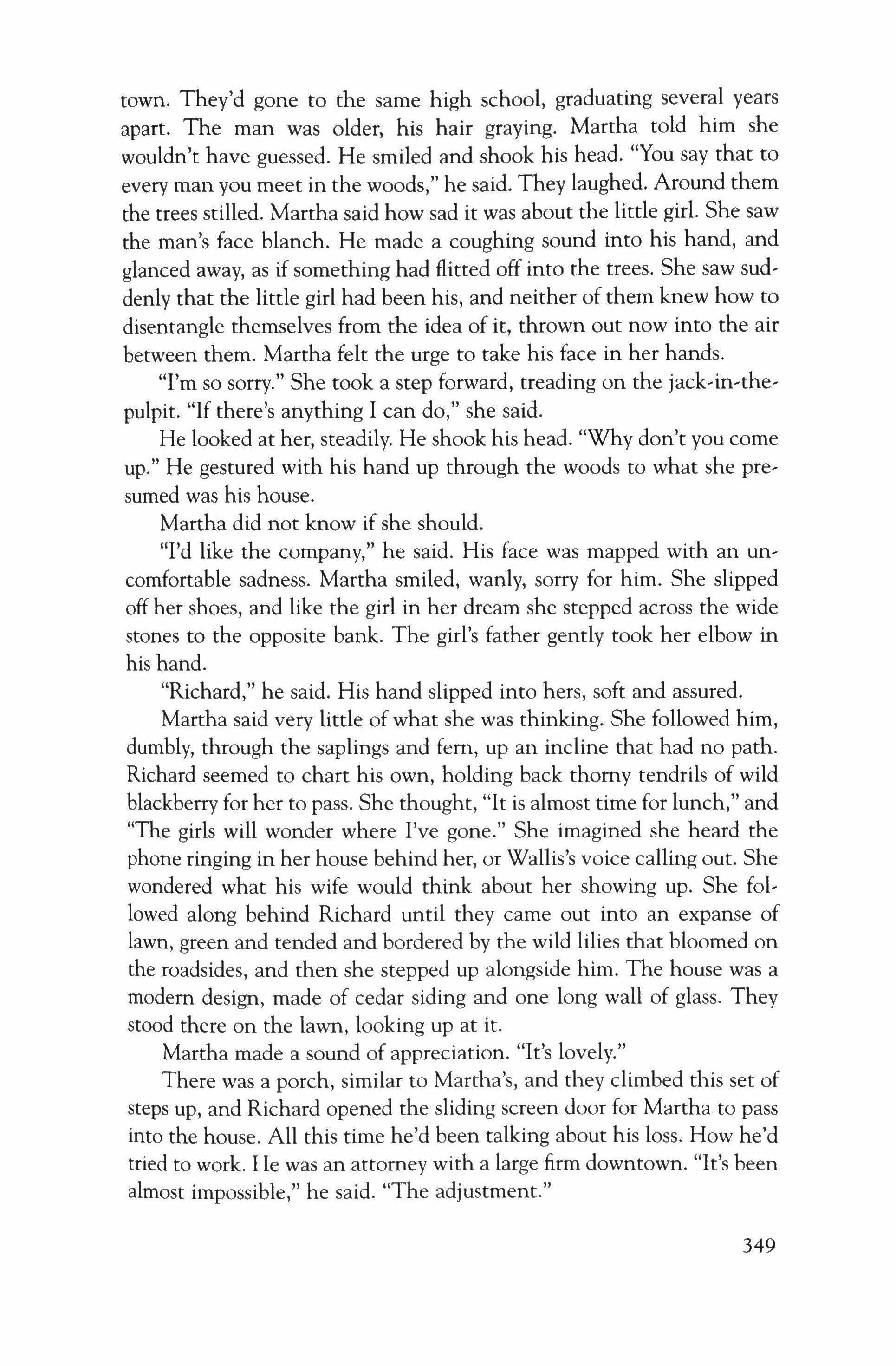
town. They'd gone to the same high school, graduating several years apart. The man was older, his hair graying. Martha told him she wouldn't have guessed. He smiled and shook his head. "You say that to every man you meet in the woods," he said. They laughed. Around them the trees stilled. Martha said how sad it was about the little girl. She saw the man's face blanch. He made a coughing sound into his hand, and glanced away, as if something had flitted off into the trees. She saw suddenly that the little girl had been his, and neither of them knew how to disentangle themselves from the idea of it, thrown out now into the air between them. Martha felt the urge to take his face in her hands.
"I'm so sorry." She took a step forward, treading on the jack-in-thepulpit. "If there's anything I can do," she said.
He looked at her, steadily. He shook his head. "Why don't you come up." He gestured with his hand up through the woods to what she presumed was his house.
Martha did not know if she should.
"I'd like the company," he said. His face was mapped with an uncomfortable sadness. Martha smiled, wanly, sorry for him. She slipped off her shoes, and like the girl in her dream she stepped across the wide stones to the opposite bank. The girl's father gently took her elbow in his hand.
"Richard," he said. His hand slipped into hers, soft and assured.
Martha said very little of what she was thinking. She followed him, dumbly, through the saplings and fern, up an incline that had no path. Richard seemed to chart his own, holding back thorny tendrils of wild blackberry for her to pass. She thought, "It is almost time for lunch," and "The girls will wonder where I've gone." She imagined she heard the phone ringing in her house behind her, or Wallis's voice calling out. She wondered what his wife would think about her showing up. She followed along behind Richard until they came out into an expanse of lawn, green and tended and bordered by the wild lilies that bloomed on the roadsides, and then she stepped up alongside him. The house was a modem design, made of cedar siding and one long wall of glass. They stood there on the lawn, looking up at it.
Martha made a sound of appreciation. "It's lovely."
There was a porch, similar to Martha's, and they climbed this set of steps up, and Richard opened the sliding screen door for Martha to pass into the house. All this time he'd been talking about his loss. How he'd tried to work. He was an attorney with a large firm downtown. "It's been almost impossible," he said. "The adjustment."
349
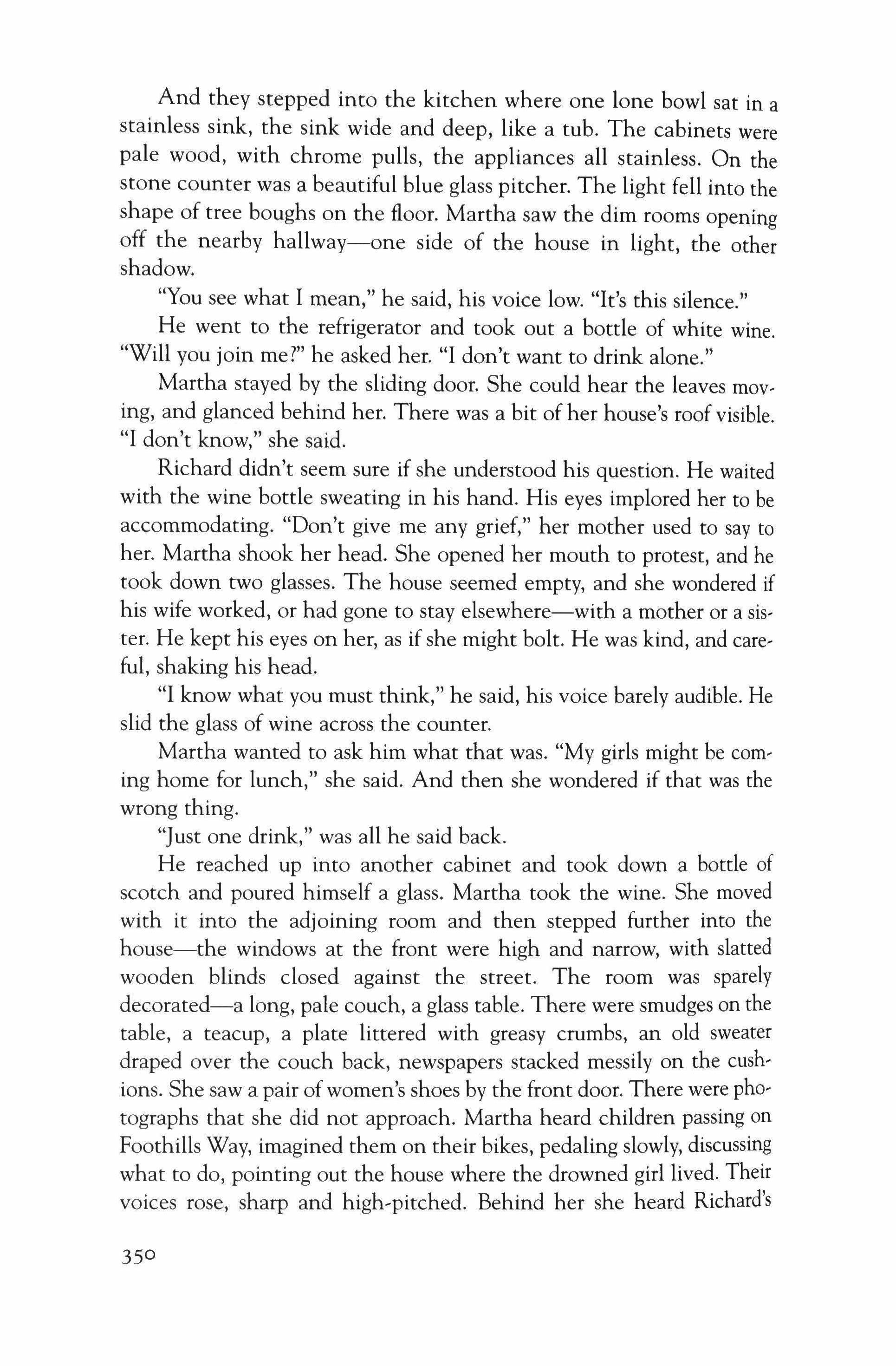
And they stepped into the kitchen where one lone bowl sat in a stainless sink, the sink wide and deep, like a tub. The cabinets were pale wood, with chrome pulls, the appliances all stainless. On the stone counter was a beautiful blue glass pitcher. The light fell into the shape of tree boughs on the floor. Martha saw the dim rooms opening off the nearby hallway-one side of the house in light, the other shadow.
"You see what I mean," he said, his voice low. "It's this silence." He went to the refrigerator and took out a bottle of white wine. "Will you join me?" he asked her. "I don't want to drink alone."
Martha stayed by the sliding door. She could hear the leaves moving, and glanced behind her. There was a bit of her house's roof visible. "I don't know," she said.
Richard didn't seem sure if she understood his question. He waited with the wine bottle sweating in his hand. His eyes implored her to be accommodating. "Don't give me any grief," her mother used to say to her. Martha shook her head. She opened her mouth to protest, and he took down two glasses. The house seemed empty, and she wondered if his wife worked, or had gone to stay elsewhere-with a mother or a sister. He kept his eyes on her, as if she might bolt. He was kind, and careful, shaking his head.
"I know what you must think," he said, his voice barely audible. He slid the glass of wine across the counter.
Martha wanted to ask him what that was. "My girls might be coming home for lunch," she said. And then she wondered if that was the wrong thing.
"Just one drink," was all he said back.
He reached up into another cabinet and took down a bottle of scotch and poured himself a glass. Martha took the wine. She moved with it into the adjoining room and then stepped further into the house-the windows at the front were high and narrow, with slatted wooden blinds closed against the street. The room was sparely decorated-a long, pale couch, a glass table. There were smudges on the table, a teacup, a plate littered with greasy crumbs, an old sweater draped over the couch back, newspapers stacked messily on the cushions. She saw a pair of women's shoes by the front door. There were photographs that she did not approach. Martha heard children passing on Foothills Way, imagined them on their bikes, pedaling slowly, discussing what to do, pointing out the house where the drowned girl lived. Their voices rose, sharp and high-pitched. Behind her she heard Richard's
350
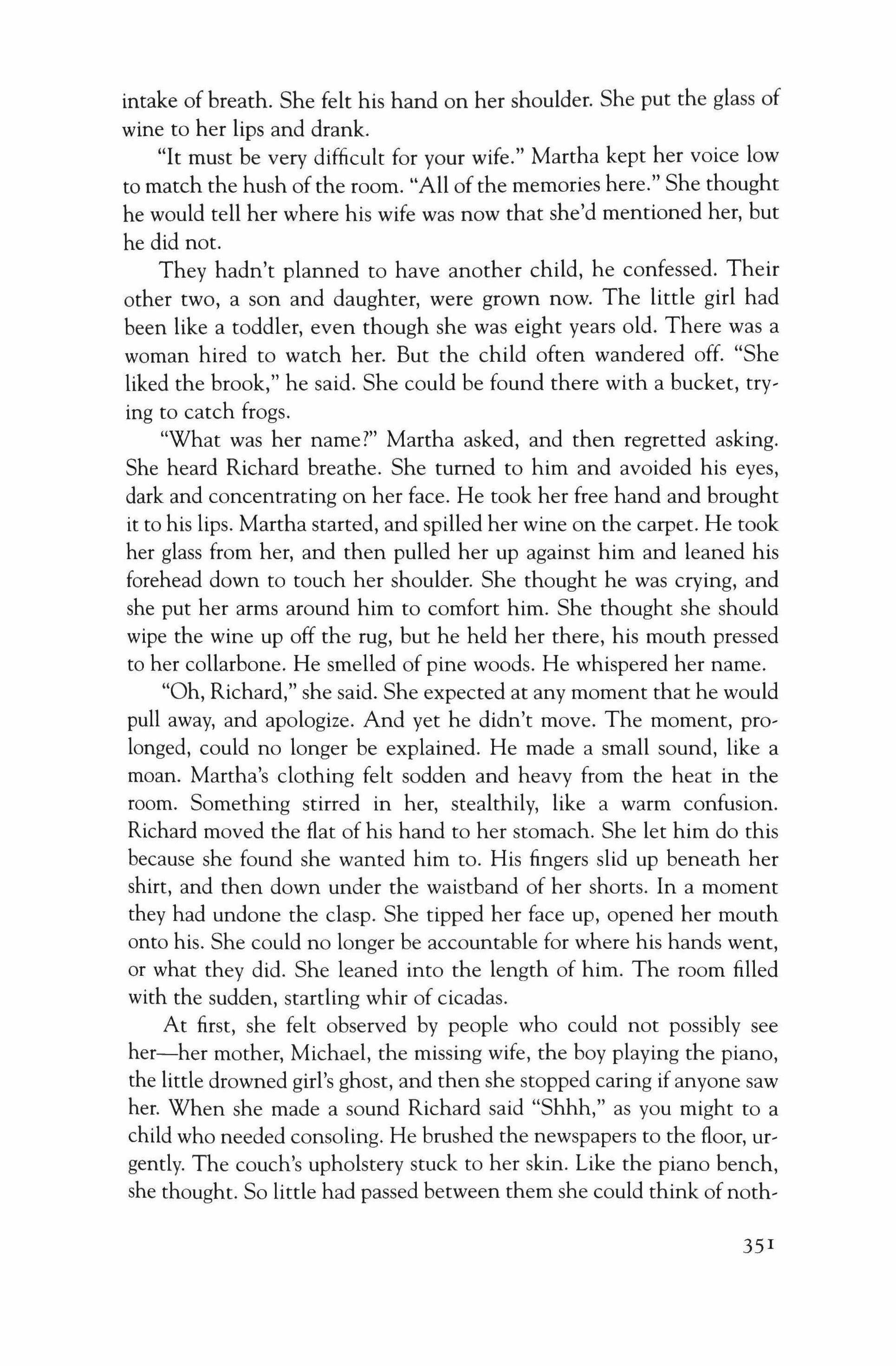
intake of breath. She felt his hand on her shoulder. She put the glass of wine to her lips and drank.
"It must be very difficult for your wife." Martha kept her voice low to match the hush of the room. "All of the memories here." She thought he would tell her where his wife was now that she'd mentioned her, but he did not.
They hadn't planned to have another child, he confessed. Their other two, a son and daughter, were grown now. The little girl had been like a toddler, even though she was eight years old. There was a woman hired to watch her. But the child often wandered off. "She liked the brook," he said. She could be found there with a bucket, trying to catch frogs.
"What was her name?" Martha asked, and then regretted asking. She heard Richard breathe. She turned to him and avoided his eyes, dark and concentrating on her face. He took her free hand and brought it to his lips. Martha started, and spilled her wine on the carpet. He took her glass from her, and then pulled her up against him and leaned his forehead down to touch her shoulder. She thought he was crying, and she put her arms around him to comfort him. She thought she should wipe the wine up off the rug, but he held her there, his mouth pressed to her collarbone. He smelled of pine woods. He whispered her name.
"Oh, Richard," she said. She expected at any moment that he would pull away, and apologize. And yet he didn't move. The moment, prolonged, could no longer be explained. He made a small sound, like a moan. Martha's clothing felt sodden and heavy from the heat in the room. Something stirred in her, stealthily, like a warm confusion. Richard moved the flat of his hand to her stomach. She let him do this because she found she wanted him to. His fingers slid up beneath her shirt, and then down under the waistband of her shorts. In a moment they had undone the clasp. She tipped her face up, opened her mouth onto his. She could no longer be accountable for where his hands went, or what they did. She leaned into the length of him. The room filled with the sudden, startling whir of cicadas.
At first, she felt observed by people who could not possibly see her-her mother, Michael, the missing wife, the boy playing the piano, the little drowned girl's ghost, and then she stopped caring if anyone saw her. When she made a sound Richard said "Shhh," as you might to a child who needed consoling. He brushed the newspapers to the floor, urgently. The couch's upholstery stuck to her skin. Like the piano bench, she thought. So little had passed between them she could think of noth-
351
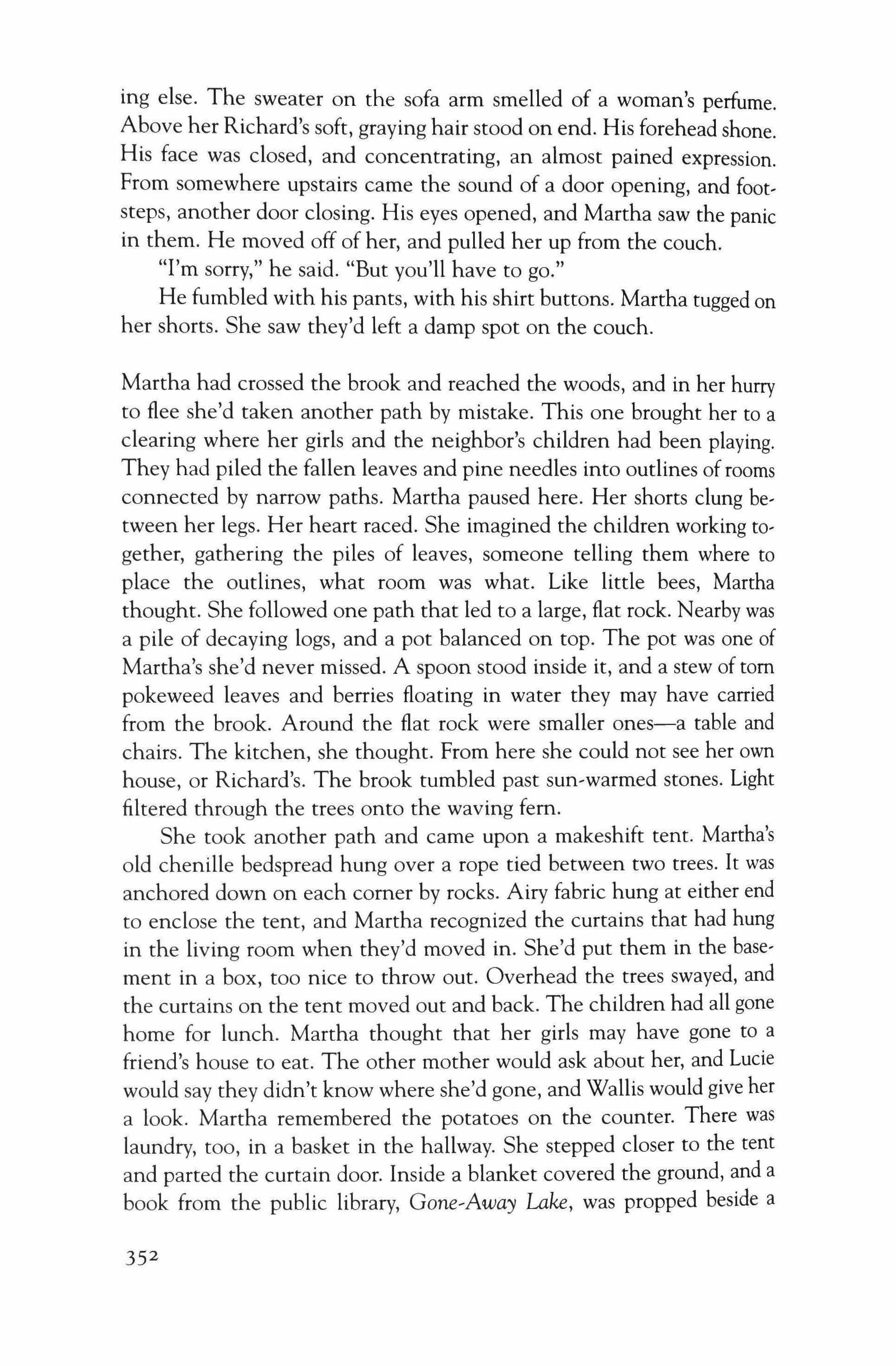
ing else. The sweater on the sofa arm smelled of a woman's perfume. Above her Richard's soft, graying hair stood on end. His forehead shone. His face was closed, and concentrating, an almost pained expression. From somewhere upstairs came the sound of a door opening, and footsteps, another door closing. His eyes opened, and Martha saw the panic in them. He moved off of her, and pulled her up from the couch.
"I'm sorry," he said. "But you'll have to go."
He fumbled with his pants, with his shirt buttons. Martha tugged on her shorts. She saw they'd left a damp spot on the couch.
Martha had crossed the brook and reached the woods, and in her hurry to flee she'd taken another path by mistake. This one brought her to a clearing where her girls and the neighbor's children had been playing. They had piled the fallen leaves and pine needles into outlines of rooms connected by narrow paths. Martha paused here. Her shorts clung between her legs. Her heart raced. She imagined the children working together, gathering the piles of leaves, someone telling them where to place the outlines, what room was what. Like little bees, Martha thought. She followed one path that led to a large, flat rock. Nearby was a pile of decaying logs, and a pot balanced on top. The pot was one of Martha's she'd never missed. A spoon stood inside it, and a stew of tom pokeweed leaves and berries floating in water they may have carried from the brook. Around the flat rock were smaller ones-a table and chairs. The kitchen, she thought. From here she could not see her own house, or Richard's. The brook tumbled past sun-warmed stones. Light filtered through the trees onto the waving fern.
She took another path and came upon a makeshift tent. Martha's old chenille bedspread hung over a rope tied between two trees. It was anchored down on each comer by rocks. Airy fabric hung at either end to enclose the tent, and Martha recognized the curtains that had hung in the living room when they'd moved in. She'd put them in the basement in a box, too nice to throw out. Overhead the trees swayed, and the curtains on the tent moved out and back. The children had all gone home for lunch. Martha thought that her girls may have gone to a friend's house to eat. The other mother would ask about her, and Lucie would say they didn't know where she'd gone, and Wallis would give her a look. Martha remembered the potatoes on the counter. There was laundry, too, in a basket in the hallway. She stepped closer to the tent and parted the curtain door. Inside a blanket covered the ground, and a book from the public library, Gone-Away Lake, was propped beside a
352
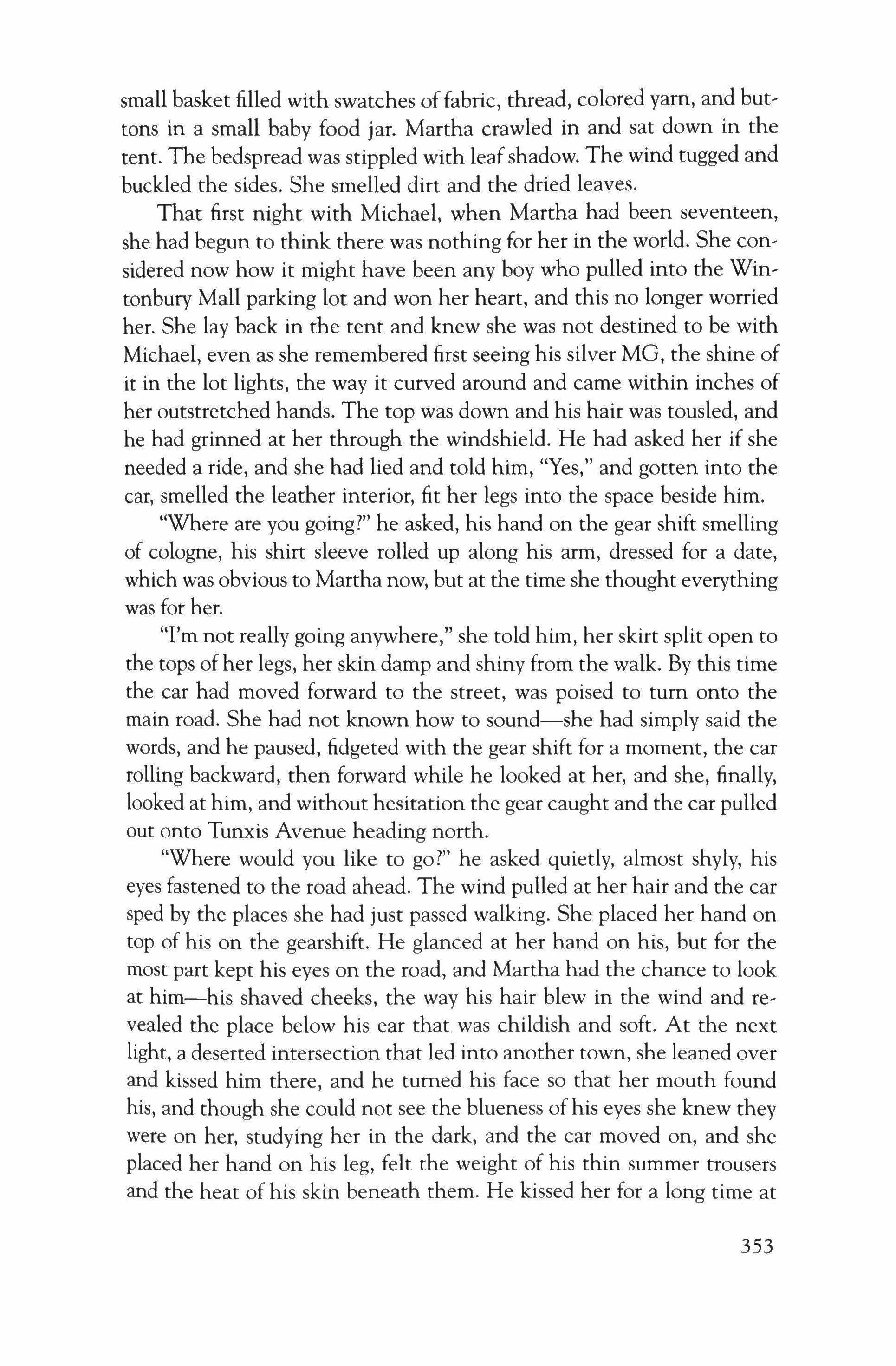
small basket filled with swatches offabric, thread, colored yam, and buttons in a small baby food jar. Martha crawled in and sat down in the tent. The bedspread was stippled with leafshadow. The wind tugged and buckled the sides. She smelled dirt and the dried leaves.
That first night with Michael, when Martha had been seventeen, she had begun to think there was nothing for her in the world. She considered now how it might have been any boy who pulled into the Win� tonbury Mall parking lot and won her heart, and this no longer worried her. She lay back in the tent and knew she was not destined to be with Michael, even as she remembered first seeing his silver MG, the shine of it in the lot lights, the way it curved around and came within inches of her outstretched hands. The top was down and his hair was tousled, and he had grinned at her through the windshield. He had asked her if she needed a ride, and she had lied and told him, "Yes," and gotten into the car, smelled the leather interior, fit her legs into the space beside him.
"Where are you going?" he asked, his hand on the gear shift smelling of cologne, his shirt sleeve rolled up along his arm, dressed for a date, which was obvious to Martha now, but at the time she thought everything was for her.
"I'm not really going anywhere," she told him, her skirt split open to the tops ofher legs, her skin damp and shiny from the walk. By this time the car had moved forward to the street, was poised to tum onto the main road. She had not known how to sound-she had simply said the words, and he paused, fidgeted with the gear shift for a moment, the car rolling backward, then forward while he looked at her, and she, finally, looked at him, and without hesitation the gear caught and the car pulled out onto Tunxis Avenue heading north.
"Where would you like to go?" he asked quietly, almost shyly, his eyes fastened to the road ahead. The wind pulled at her hair and the car sped by the places she had just passed walking. She placed her hand on top of his on the gearshift. He glanced at her hand on his, but for the most part kept his eyes on the road, and Martha had the chance to look at him-his shaved cheeks, the way his hair blew in the wind and revealed the place below his ear that was childish and soft. At the next light, a deserted intersection that led into another town, she leaned over and kissed him there, and he turned his face so that her mouth found his, and though she could not see the blueness of his eyes she knew they were on her, studying her in the dark, and the car moved on, and she placed her hand on his leg, felt the weight of his thin summer trousers and the heat of his skin beneath them. He kissed her for a long time at
353
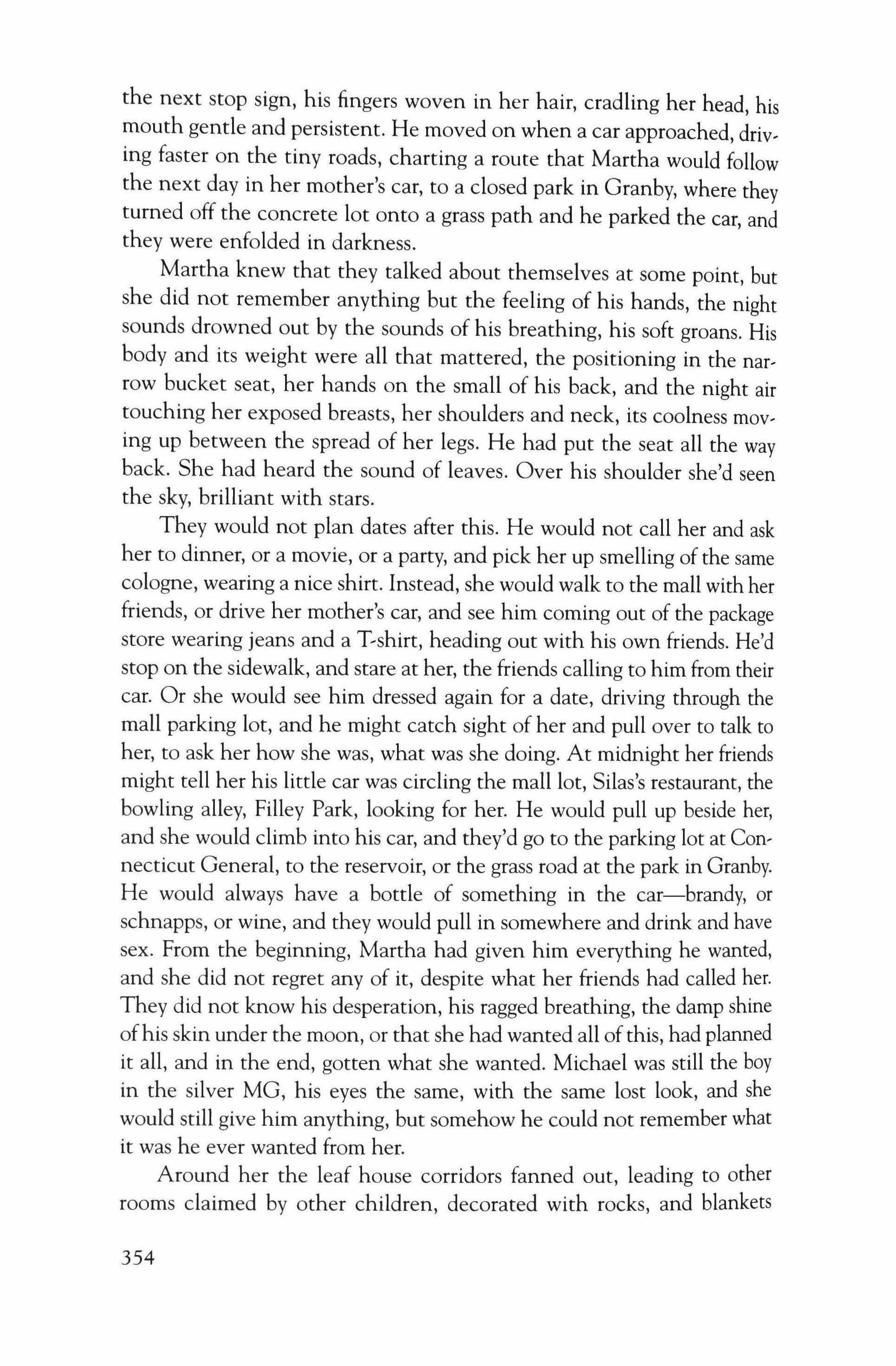
the next stop sign, his fingers woven in her hair, cradling her head, his mouth gentle and persistent. He moved on when a car approached, driving faster on the tiny roads, charting a route that Martha would follow the next day in her mother's car, to a closed park in Granby, where they turned off the concrete lot onto a grass path and he parked the car, and they were enfolded in darkness.
Martha knew that they talked about themselves at some point, but she did not remember anything but the feeling of his hands, the night sounds drowned out by the sounds of his breathing, his soft groans. His body and its weight were all that mattered, the positioning in the narrow bucket seat, her hands on the small of his back, and the night air touching her exposed breasts, her shoulders and neck, its coolness moving up between the spread of her legs. He had put the seat all the way back. She had heard the sound of leaves. Over his shoulder she'd seen the sky, brilliant with stars.
They would not plan dates after this. He would not call her and ask her to dinner, or a movie, or a party, and pick her up smelling of the same cologne, wearing a nice shirt. Instead, she would walk to the mall with her friends, or drive her mother's car, and see him coming out of the package store wearing jeans and a T'shirt, heading out with his own friends. He'd stop on the sidewalk, and stare at her, the friends calling to him from their car. Or she would see him dressed again for a date, driving through the mall parking lot, and he might catch sight of her and pull over to talk to her, to ask her how she was, what was she doing. At midnight her friends might tell her his little car was circling the mall lot, Silas's restaurant, the bowling alley, Filley Park, looking for her. He would pull up beside her, and she would climb into his car, and they'd go to the parking lot at Connecticut General, to the reservoir, or the grass road at the park in Granby. He would always have a bottle of something in the car-brandy, or schnapps, or wine, and they would pull in somewhere and drink and have sex. From the beginning, Martha had given him everything he wanted, and she did not regret any of it, despite what her friends had called her. They did not know his desperation, his ragged breathing, the damp shine ofhis skin under the moon, or that she had wanted all of this, had planned it all, and in the end, gotten what she wanted. Michael was still the boy in the silver MG, his eyes the same, with the same lost look, and she would still give him anything, but somehow he could not remember what it was he ever wanted from her.
Around her the leaf house corridors fanned out, leading to other rooms claimed by other children, decorated with rocks, and blankets
354
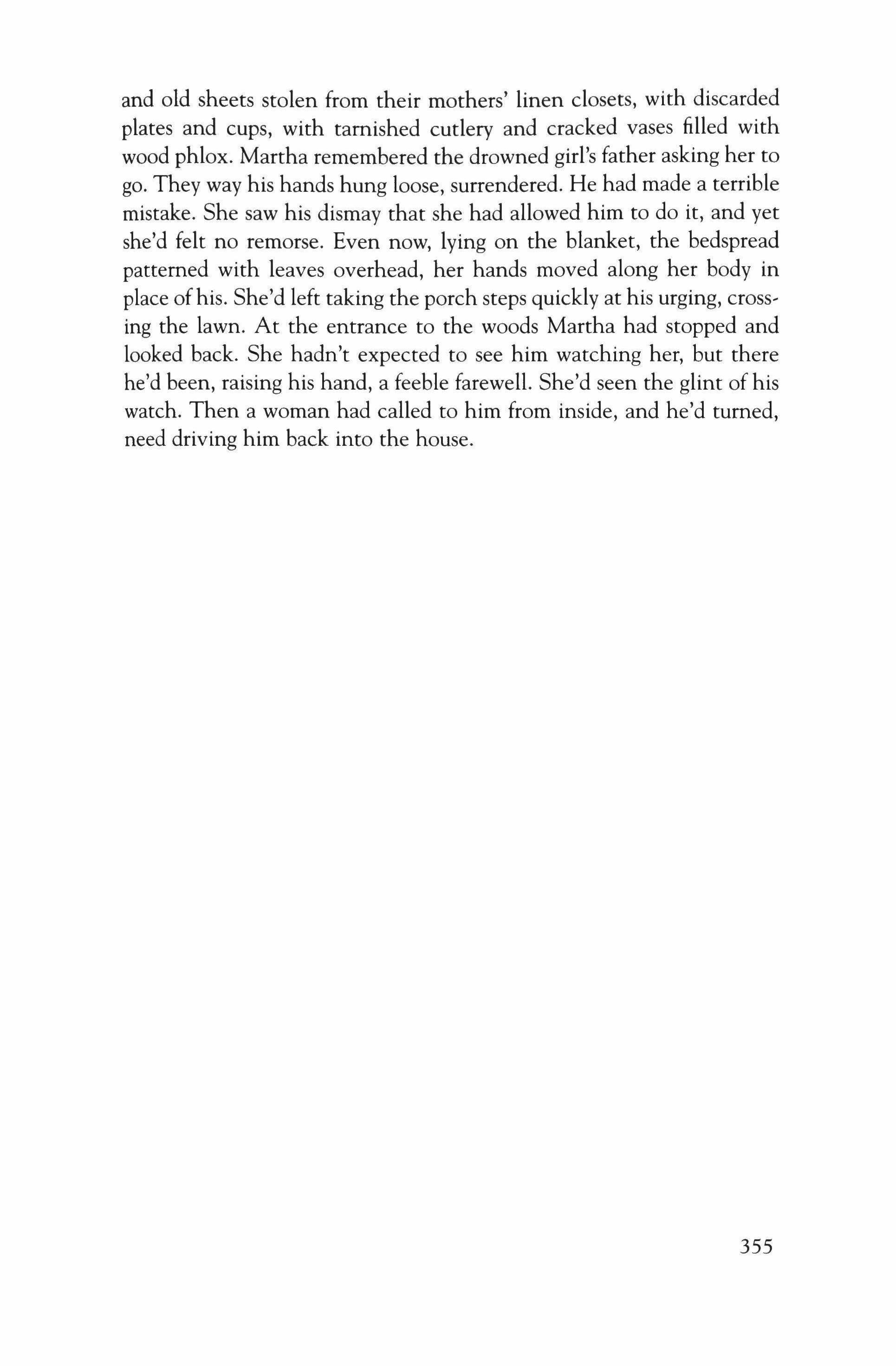
and old sheets stolen from their mothers' linen closets, with discarded plates and cups, with tarnished cutlery and cracked vases filled with wood phlox. Martha remembered the drowned girl's father asking her to go. They way his hands hung loose, surrendered. He had made a terrible mistake. She saw his dismay that she had allowed him to do it, and yet she'd felt no remorse. Even now, lying on the blanket, the bedspread patterned with leaves overhead, her hands moved along her body in place ofhis. She'd left taking the porch steps quickly at his urging, crossing the lawn. At the entrance to the woods Martha had stopped and looked back. She hadn't expected to see him watching her, but there he'd been, raising his hand, a feeble farewell. She'd seen the glint of his watch. Then a woman had called to him from inside, and he'd turned, need driving him back into the house.
355
Jay Neugeboren
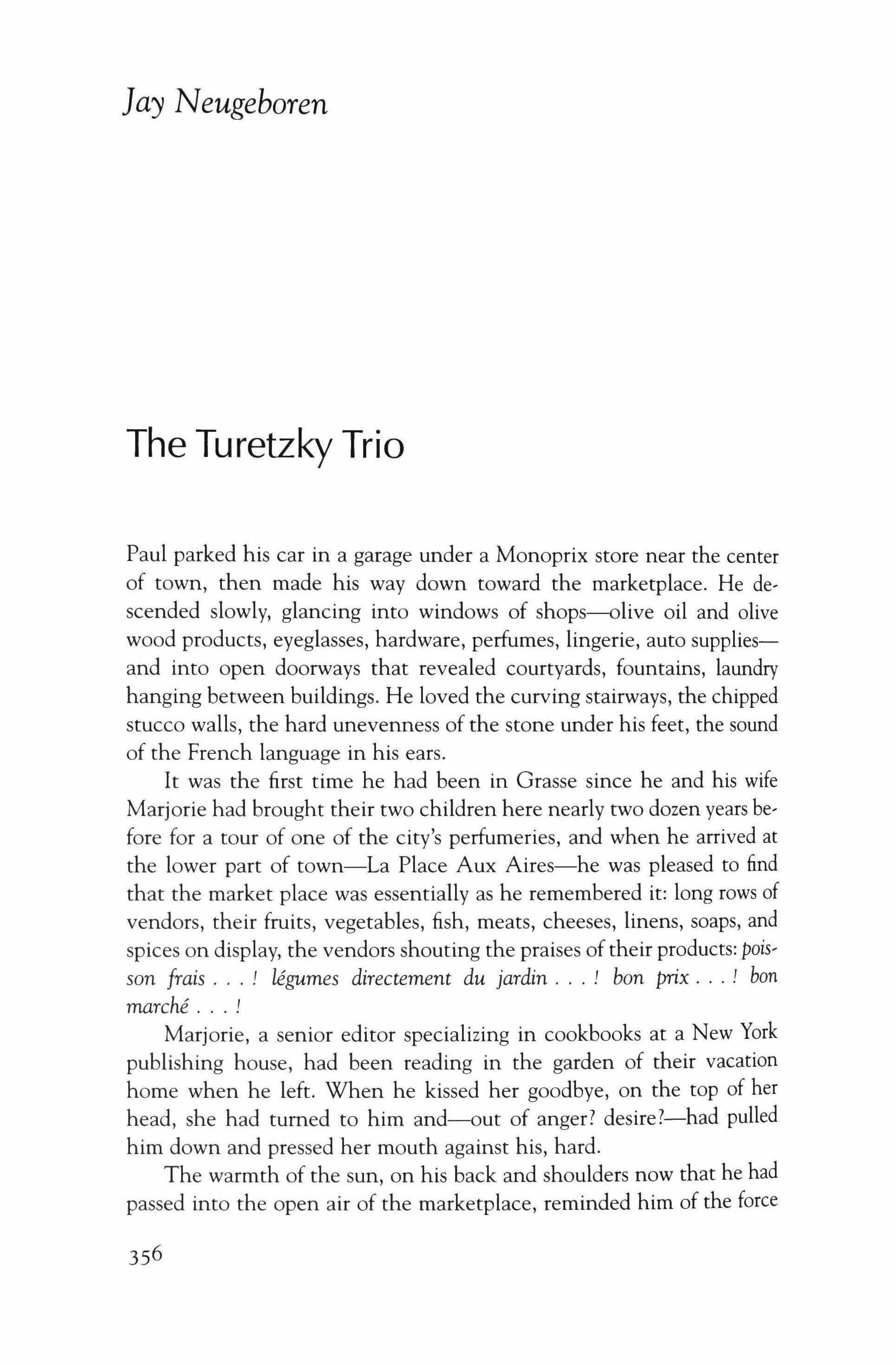
The Turetzky Trio
Paul parked his car in a garage under a Monoprix store near the center of town, then made his way down toward the marketplace. He descended slowly, glancing into windows of shops-olive oil and olive wood products, eyeglasses, hardware, perfumes, lingerie, auto suppliesand into open doorways that revealed courtyards, fountains, laundry hanging between buildings. He loved the curving stairways, the chipped stucco walls, the hard unevenness of the stone under his feet, the sound of the French language in his ears.
It was the first time he had been in Grasse since he and his wife Marjorie had brought their two children here nearly two dozen years before for a tour of one of the city's perfumeries, and when he arrived at the lower part of town-La Place Aux Aires-he was pleased to find that the market place was essentially as he remembered it: long rows of vendors, their fruits, vegetables, fish, meats, cheeses, linens, soaps, and spices on display, the vendors shouting the praises of their products: poisson frais .! legumes directement du jardin .! bon prix. .! bon marche !
Marjorie, a senior editor specializing in cookbooks at a New York publishing house, had been reading in the garden of their vacation home when he left. When he kissed her goodbye, on the top of her head, she had turned to him and-out of anger? desire?-had pulled him down and pressed her mouth against his, hard.
The warmth of the sun, on his back and shoulders now that he had passed into the open air of the marketplace, reminded him of the force
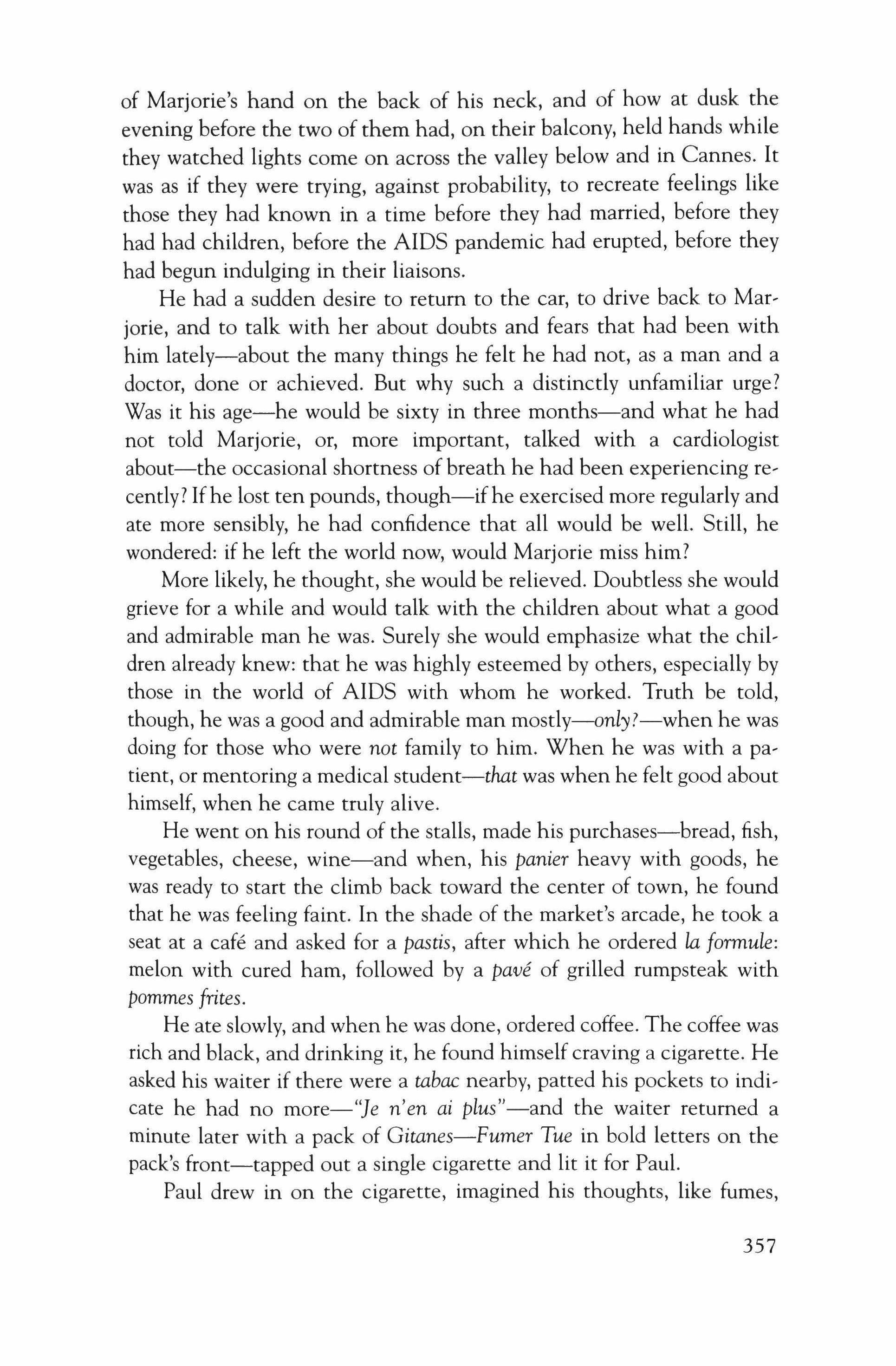
of Marjorie's hand on the back of his neck, and of how at dusk the evening before the two of them had, on their balcony, held hands while they watched lights come on across the valley below and in Cannes. It was as if they were trying, against probability, to recreate feelings like those they had known in a time before they had married, before they had had children, before the AIDS pandemic had erupted, before they had begun indulging in their liaisons.
He had a sudden desire to return to the car, to drive back to Marjorie, and to talk with her about doubts and fears that had been with him lately-about the many things he felt he had not, as a man and a doctor, done or achieved. But why such a distinctly unfamiliar urge? Was it his age-he would be sixty in three months-and what he had not told Marjorie, or, more important, talked with a cardiologist about-the occasional shortness of breath he had been experiencing recently? Ifhe lost ten pounds, though-ifhe exercised more regularly and ate more sensibly, he had confidence that all would be well. Still, he wondered: if he left the world now, would Marjorie miss him?
More likely, he thought, she would be relieved. Doubtless she would grieve for a while and would talk with the children about what a good and admirable man he was. Surely she would emphasize what the children already knew: that he was highly esteemed by others, especially by those in the world of AIDS with whom he worked. Truth be told, though, he was a good and admirable man mostly-only?-when he was doing for those who were not family to him. When he was with a patient, or mentoring a medical student-that was when he felt good about himself, when he came truly alive.
He went on his round of the stalls, made his purchases-bread, fish, vegetables, cheese, wine-and when, his panier heavy with goods, he was ready to start the climb back toward the center of town, he found that he was feeling faint. In the shade of the market's arcade, he took a seat at a cafe and asked for a pastis, after which he ordered la formule: melon with cured ham, followed by a pave of grilled rumpsteak with pommes frites.
He ate slowly, and when he was done, ordered coffee. The coffee was rich and black, and drinking it, he found himself craving a cigarette. He asked his waiter if there were a tabac nearby, patted his pockets to indicate he had no more-HJe n'en ai plusH-and the waiter returned a minute later with a pack of Gitanes-Fumer Tue in bold letters on the pack's front-tapped out a single cigarette and lit it for Paul.
Paul drew in on the cigarette, imagined his thoughts, like fumes,
357
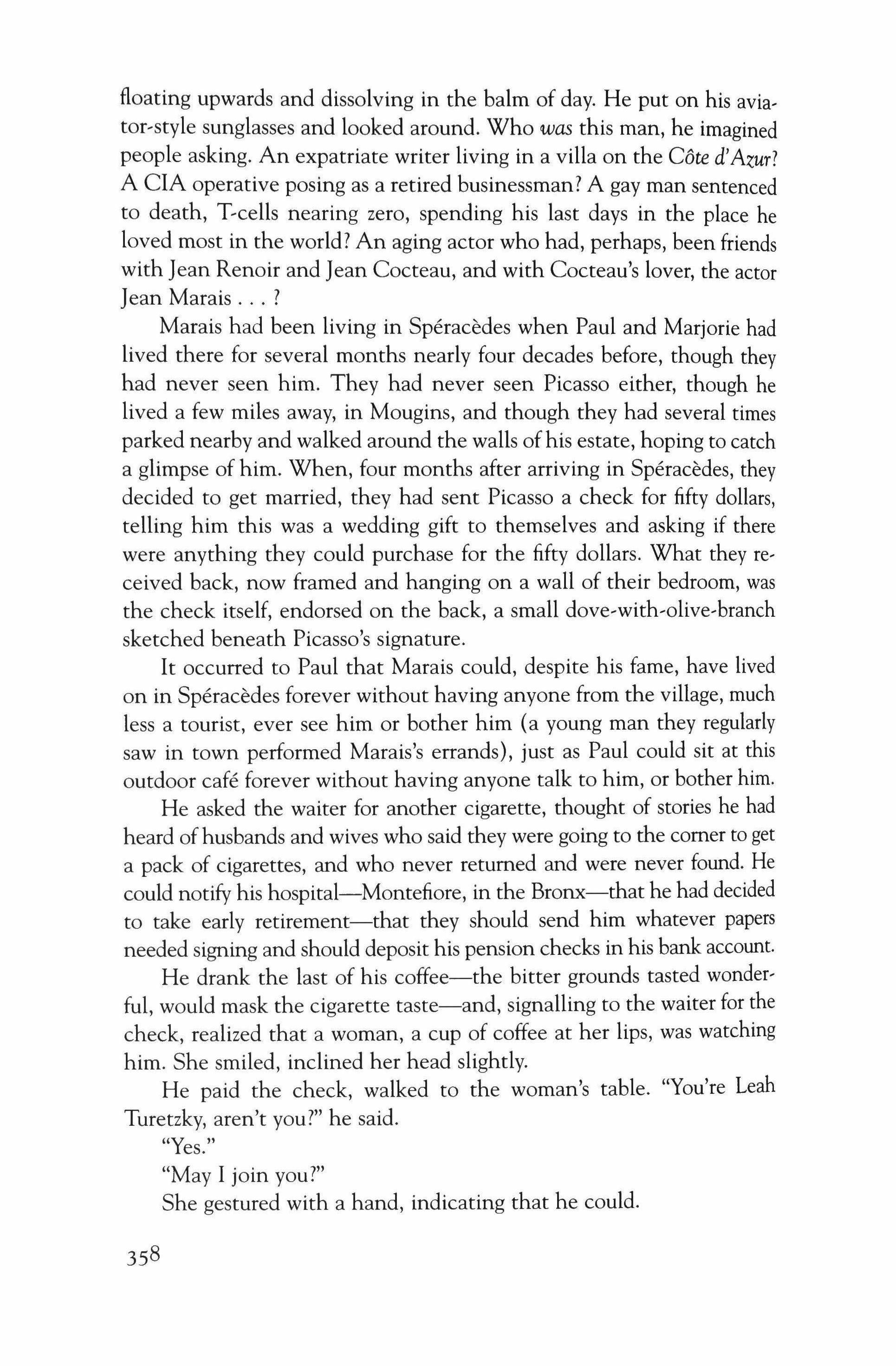
floating upwards and dissolving in the balm of day. He put on his aviator-style sunglasses and looked around. Who was this man, he imagined people asking. An expatriate writer living in a villa on the Cote d'Azur? A CIA operative posing as a retired businessman? A gay man sentenced to death, T-cells nearing zero, spending his last days in the place he loved most in the world? An aging actor who had, perhaps, been friends with Jean Renoir and Jean Cocteau, and with Cocteau's lover, the actor Jean Marais ?
Marais had been living in Speracedes when Paul and Marjorie had lived there for several months nearly four decades before, though they had never seen him. They had never seen Picasso either, though he lived a few miles away, in Mougins, and though they had several times parked nearby and walked around the walls ofhis estate, hoping to catch a glimpse of him. When, four months after arriving in Speracedes, they decided to get married, they had sent Picasso a check for fifty dollars, telling him this was a wedding gift to themselves and asking if there were anything they could purchase for the fifty dollars. What they received back, now framed and hanging on a wall of their bedroom, was the check itself, endorsed on the back, a small dove-with-olive-branch sketched beneath Picasso's signature.
It occurred to Paul that Marais could, despite his fame, have lived on in Speracedes forever without having anyone from the village, much less a tourist, ever see him or bother him (a young man they regularly saw in town performed Marais's errands), just as Paul could sit at this outdoor cafe forever without having anyone talk to him, or bother him.
He asked the waiter for another cigarette, thought of stories he had heard ofhusbands and wives who said they were going to the comer to get a pack of cigarettes, and who never returned and were never found. He could notify his hospital-Montefiore, in the Bronx-that he had decided to take early retirement-that they should send him whatever papers needed signing and should deposit his pension checks in his bank account.
He drank the last of his coffee-the bitter grounds tasted wonderful, would mask the cigarette taste-and, signalling to the waiter for the check, realized that a woman, a cup of coffee at her lips, was watching him. She smiled, inclined her head slightly.
He paid the check, walked to the woman's table. "You're Leah Turetzky, aren't you?" he said.
"Yes."
"May I join you?"
She gestured with a hand, indicating that he could.
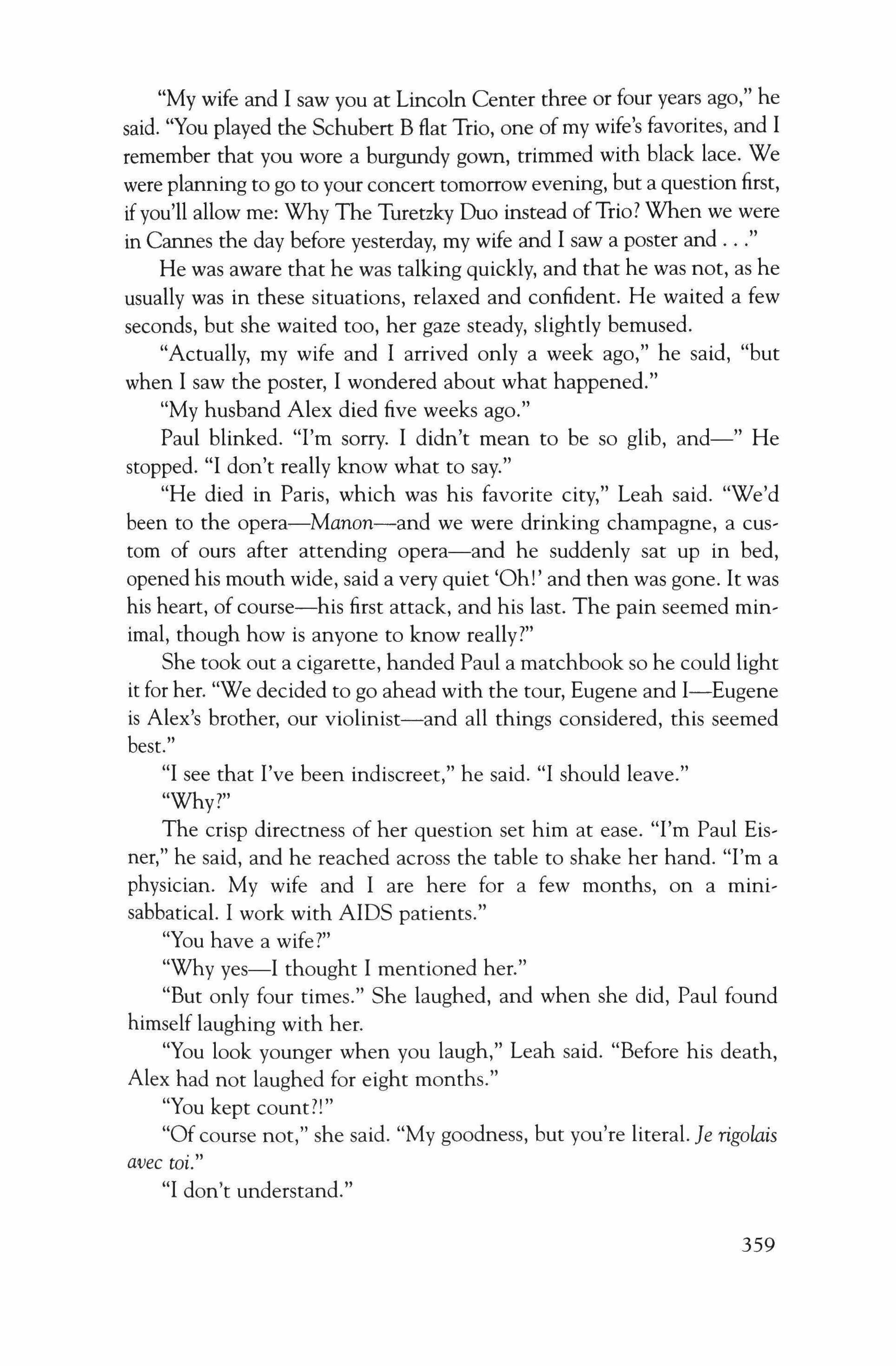
"My wife and I saw you at Lincoln Center three or four years ago," he said. "You played the Schubert B flat Trio, one of my wife's favorites, and I remember that you wore a burgundy gown, trimmed with black lace. We were planning to go to your concert tomorrow evening, but a question first, ifyou'll allow me: Why The Turetzky Duo instead of Trio? When we were in Cannes the day before yesterday, my wife and I saw a poster and He was aware that he was talking quickly, and that he was not, as he usually was in these situations, relaxed and confident. He waited a few seconds, but she waited too, her gaze steady, slightly bemused.
"Actually, my wife and I arrived only a week ago," he said, "but when I saw the poster, I wondered about what happened."
"My husband Alex died five weeks ago."
Paul blinked. "I'm sorry. I didn't mean to be so glib, and-" He stopped. "I don't really know what to say."
"He died in Paris, which was his favorite city," Leah said. "We'd been to the opera-Manon-and we were drinking champagne, a custom of ours after attending opera-and he suddenly sat up in bed, opened his mouth wide, said a very quiet 'Oh!' and then was gone. It was his heart, of course-his first attack, and his last. The pain seemed minimal, though how is anyone to know really?"
She took out a cigarette, handed Paul a matchbook so he could light it for her. "We decided to go ahead with the tour, Eugene and I-Eugene is Alex's brother, our violinist-and all things considered, this seemed best."
"I see that I've been indiscreet," he said. "I should leave."
"Why?"
The crisp directness of her question set him at ease. "I'm Paul Eisner," he said, and he reached across the table to shake her hand. "I'm a physician. My wife and I are here for a few months, on a minisabbatical. I work with AIDS patients."
"You have a wife?"
"Why yes-I thought I mentioned her."
"But only four times." She laughed, and when she did, Paul found himself laughing with her.
"You look younger when you laugh," Leah said. "Before his death, Alex had not laughed for eight months."
"You kept count?!"
"Of course not," she said. "My goodness, but you're literal. [e rigolais avec toi."
"I don't understand."
359
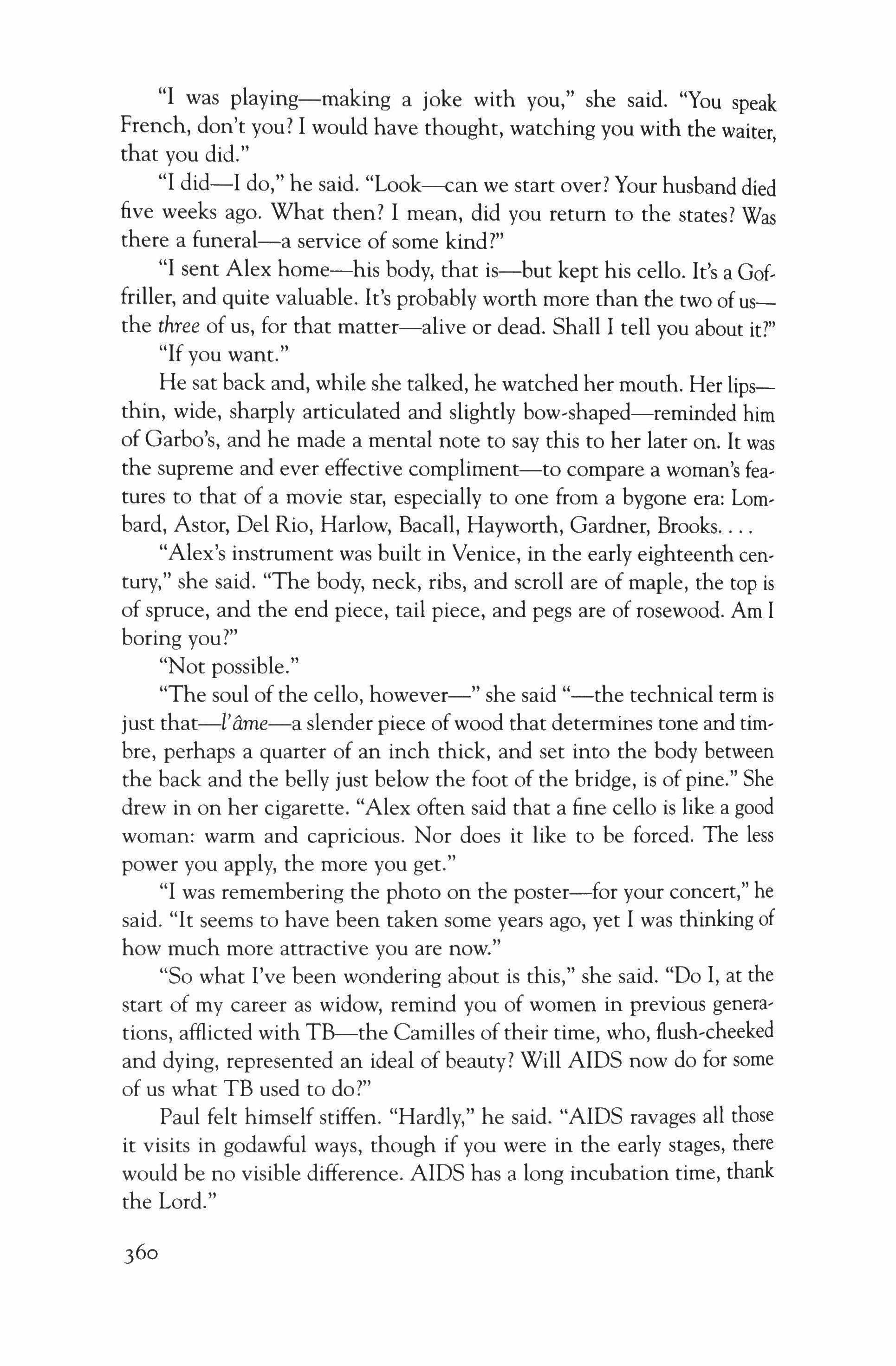
"I was playing-making a joke with you," she said. "You speak French, don't you? I would have thought, watching you with the waiter, that you did."
"I did-I do," he said. "Look-can we start over? Your husband died five weeks ago. What then? I mean, did you return to the states? Was there a funeral-a service of some kind?"
"I sent Alex home-his body, that is-but kept his cello. It's a Goffriller, and quite valuable. It's probably worth more than the two of usthe three of us, for that matter-alive or dead. Shall I tell you about it?"
"If you want."
He sat back and, while she talked, he watched her mouth. Her lipsthin, wide, sharply articulated and slightly bow-shaped-reminded him of Garbo's, and he made a mental note to say this to her later on. It was the supreme and ever effective compliment-to compare a woman's features to that of a movie star, especially to one from a bygone era: Lombard, Astor, Del Rio, Harlow, Bacall, Hayworth, Gardner, Brooks
"Alex's instrument was built in Venice, in the early eighteenth century," she said. "The body, neck, ribs, and scroll are of maple, the top is of spruce, and the end piece, tail piece, and pegs are of rosewood. Am I boring you?"
"Not possible."
"The soul of the cello, however-" she said "-the technical term is just that-l'iime-a slender piece ofwood that determines tone and timbre, perhaps a quarter of an inch thick, and set into the body between the back and the belly just below the foot of the bridge, is of pine." She drew in on her cigarette. "Alex often said that a fine cello is like a good woman: warm and capricious. Nor does it like to be forced. The less power you apply, the more you get."
"I was remembering the photo on the poster-for your concert," he said. "It seems to have been taken some years ago, yet I was thinking of how much more attractive you are now."
"So what I've been wondering about is this," she said. "Do I, at the start of my career as widow, remind you of women in previous generations, afflicted with TB---the Camilles of their time, who, flush-cheeked and dying, represented an ideal of beauty? Will AIDS now do for some of us what TB used to do?"
Paul felt himself stiffen. "Hardly," he said. "AIDS ravages all those it visits in godawful ways, though if you were in the early stages, there would be no visible difference. AIDS has a long incubation time, thank the Lord."
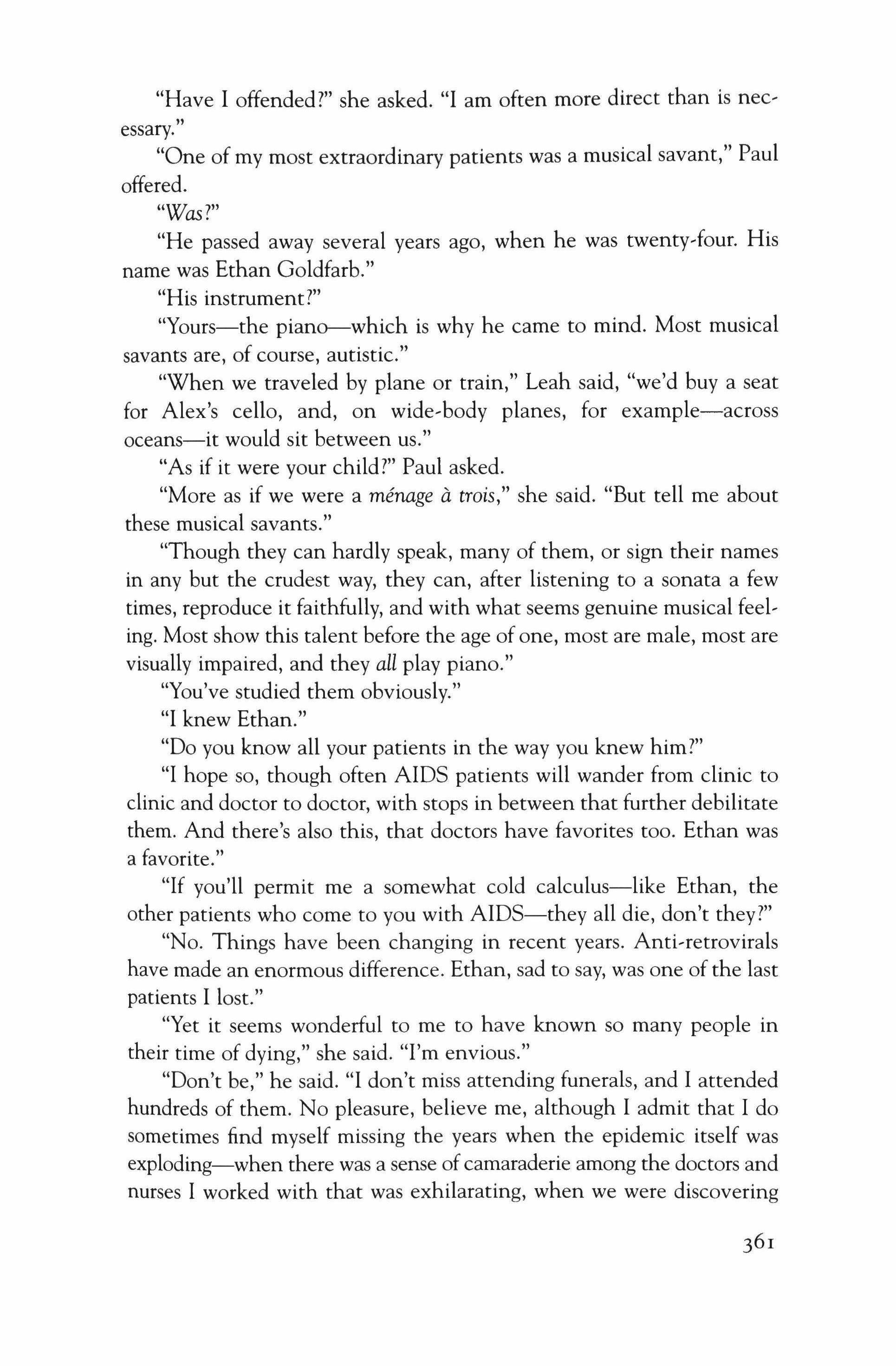
"Have I offended?" she asked. "I am often more direct than is neeessary."
"One of my most extraordinary patients was a musical savant," Paul offered.
"Was?"
"He passed away several years ago, when he was twenty-four. His name was Ethan Goldfarb."
"His instrument?"
"Yours-the piano-which is why he came to mind. Most musical savants are, of course, autistic."
"When we traveled by plane or train," Leah said, "we'd buy a seat for Alex's cello, and, on wide,body planes, for example-across oceans-it would sit between us."
"As if it were your child?" Paul asked.
"More as if we were a menage a trois," she said. "But tell me about these musical savants."
"Though they can hardly speak, many of them, or sign their names in any but the crudest way, they can, after listening to a sonata a few times, reproduce it faithfully, and with what seems genuine musical feel, ing. Most show this talent before the age of one, most are male, most are visually impaired, and they all play piano."
"You've studied them obviously."
"I knew Ethan."
"Do you know all your patients in the way you knew him?"
"I hope so, though often AIDS patients will wander from clinic to clinic and doctor to doctor, with stops in between that further debilitate them. And there's also this, that doctors have favorites too. Ethan was a favorite."
"If you'll permit me a somewhat cold calculus-like Ethan, the other patients who come to you with AIDS-they all die, don't they?"
"No. Things have been changing in recent years. Anti-retrovirals have made an enormous difference. Ethan, sad to say, was one of the last patients I lost."
"Yet it seems wonderful to me to have known so many people in their time of dying," she said. "I'm envious."
"Don't be," he said. "I don't miss attending funerals, and I attended hundreds of them. No pleasure, believe me, although I admit that I do sometimes find myself missing the years when the epidemic itself was exploding-when there was a sense ofcamaraderie among the doctors and nurses I worked with that was exhilarating, when we were discovering
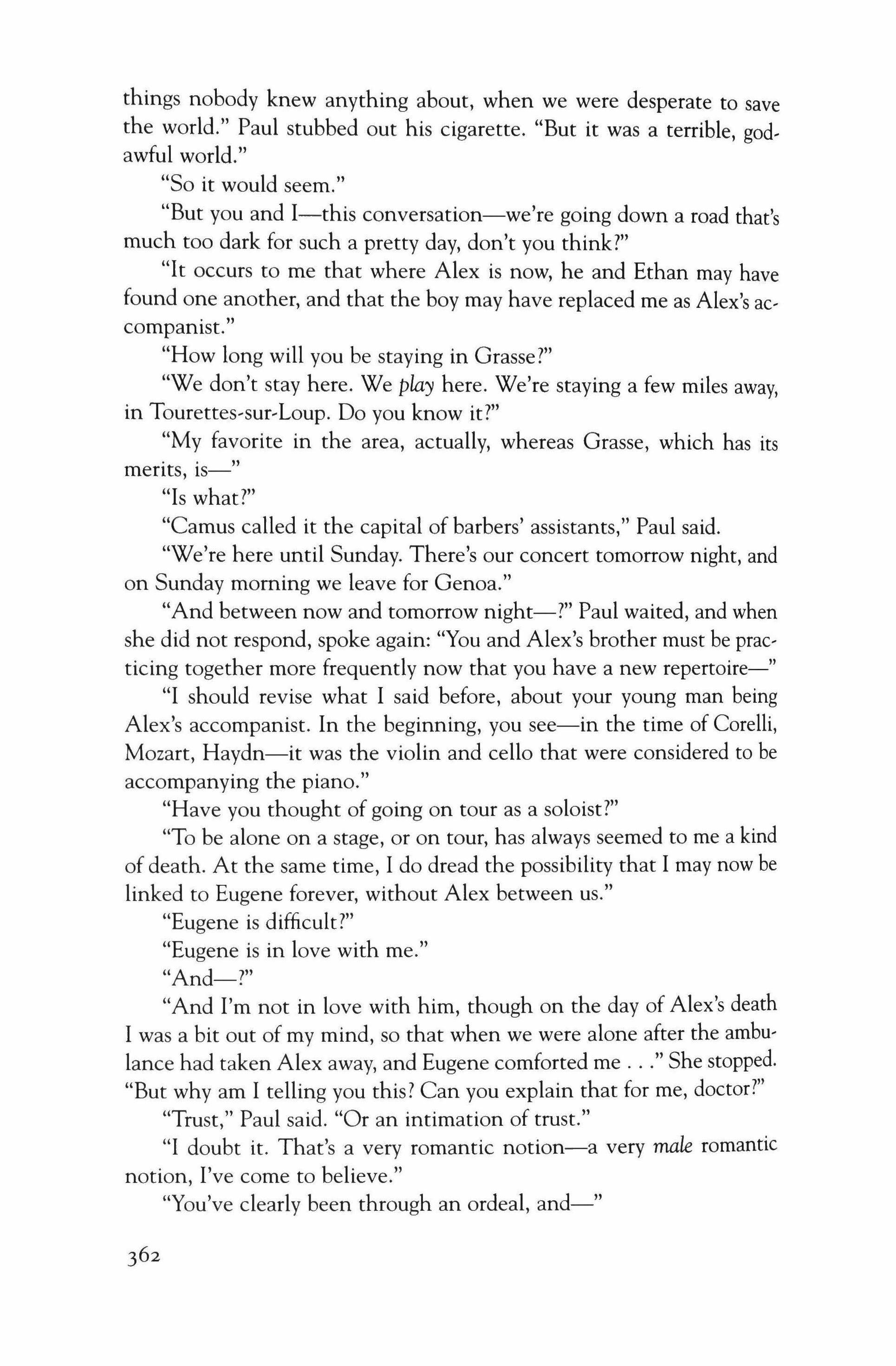
things nobody knew anything about, when we were desperate to save the world." Paul stubbed out his cigarette. "But it was a terrible, godawful world."
"So it would seem."
"But you and I-this conversation-we're going down a road that's much too dark for such a pretty day, don't you think?"
"It occurs to me that where Alex is now, he and Ethan may have found one another, and that the boy may have replaced me as Alex's accompanist."
"How long will you be staying in Grasse?"
"We don't stay here. We play here. We're staying a few miles away, in Tourettes-sur-Loup. Do you know it?"
"My favorite in the area, actually, whereas Grasse, which has its merits, is-"
"Is what?"
"Camus called it the capital of barbers' assistants," Paul said.
"We're here until Sunday. There's our concert tomorrow night, and on Sunday morning we leave for Genoa."
"And between now and tomorrow night-?" Paul waited, and when she did not respond, spoke again: "You and Alex's brother must be practicing together more frequently now that you have a new repertoire-"
"I should revise what I said before, about your young man being Alex's accompanist. In the beginning, you see-in the time of Corelli, Mozart, Haydn-it was the violin and cello that were considered to be accompanying the piano."
"Have you thought of going on tour as a soloist?"
"To be alone on a stage, or on tour, has always seemed to me a kind of death. At the same time, I do dread the possibility that I may now be linked to Eugene forever, without Alex between us."
"Eugene is difficult?"
"Eugene is in love with me."
"And-?"
"And I'm not in love with him, though on the day of Alex's death I was a bit out of my mind, so that when we were alone after the ambulance had taken Alex away, and Eugene comforted me She stopped. "But why am I telling you this? Can you explain that for me, doctor?"
"Trust," Paul said. "Or an intimation of trust."
"I doubt it. That's a very romantic notion-a very male romantic notion, I've come to believe."
"You've clearly been through an ordeal, and-"
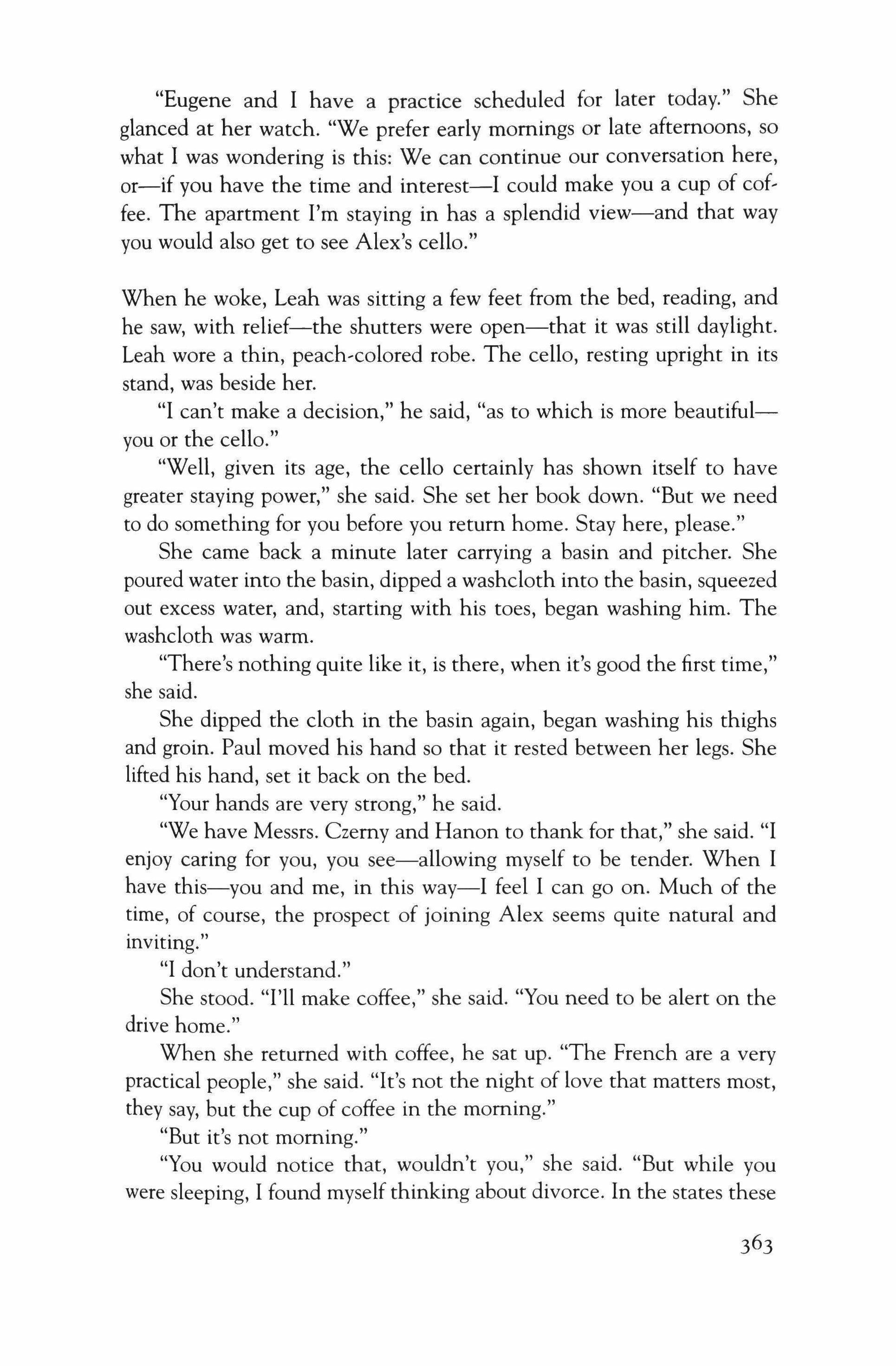
"Eugene and I have a practice scheduled for later today." She glanced at her watch. "We prefer early mornings or late afternoons, so what I was wondering is this: We can continue our conversation here, or-if you have the time and interest-I could make you a cup of coffee. The apartment I'm staying in has a splendid view-and that way you would also get to see Alex's cello."
When he woke, Leah was sitting a few feet from the bed, reading, and he saw, with relief-the shutters were open-that it was still daylight. Leah wore a thin, peach-colored robe. The cello, resting upright in its stand, was beside her.
"I can't make a decision," he said, "as to which is more beautifulyou or the cello."
"Well, given its age, the cello certainly has shown itself to have greater staying power," she said. She set her book down. "But we need to do something for you before you return home. Stay here, please."
She came back a minute later carrying a basin and pitcher. She poured water into the basin, dipped a washcloth into the basin, squeezed out excess water, and, starting with his toes, began washing him. The washcloth was warm.
"There's nothing quite like it, is there, when it's good the first time," she said.
She dipped the cloth in the basin again, began washing his thighs and groin. Paul moved his hand so that it rested between her legs. She lifted his hand, set it back on the bed.
"Your hands are very strong," he said.
"We have Messrs. Czerny and Hanon to thank for that," she said. "I enjoy caring for you, you see-allowing myself to be tender. When I have this-you and me, in this way-I feel I can go on. Much of the time, of course, the prospect of joining Alex seems quite natural and inviting."
"I don't understand."
She stood. "I'll make coffee," she said. "You need to be alert on the drive home."
When she returned with coffee, he sat up. "The French are a very practical people," she said. "It's not the night of love that matters most, they say, but the cup of coffee in the morning."
"But it's not morning."
"You would notice that, wouldn't you," she said. "But while you were sleeping, I found myselfthinking about divorce. In the states these
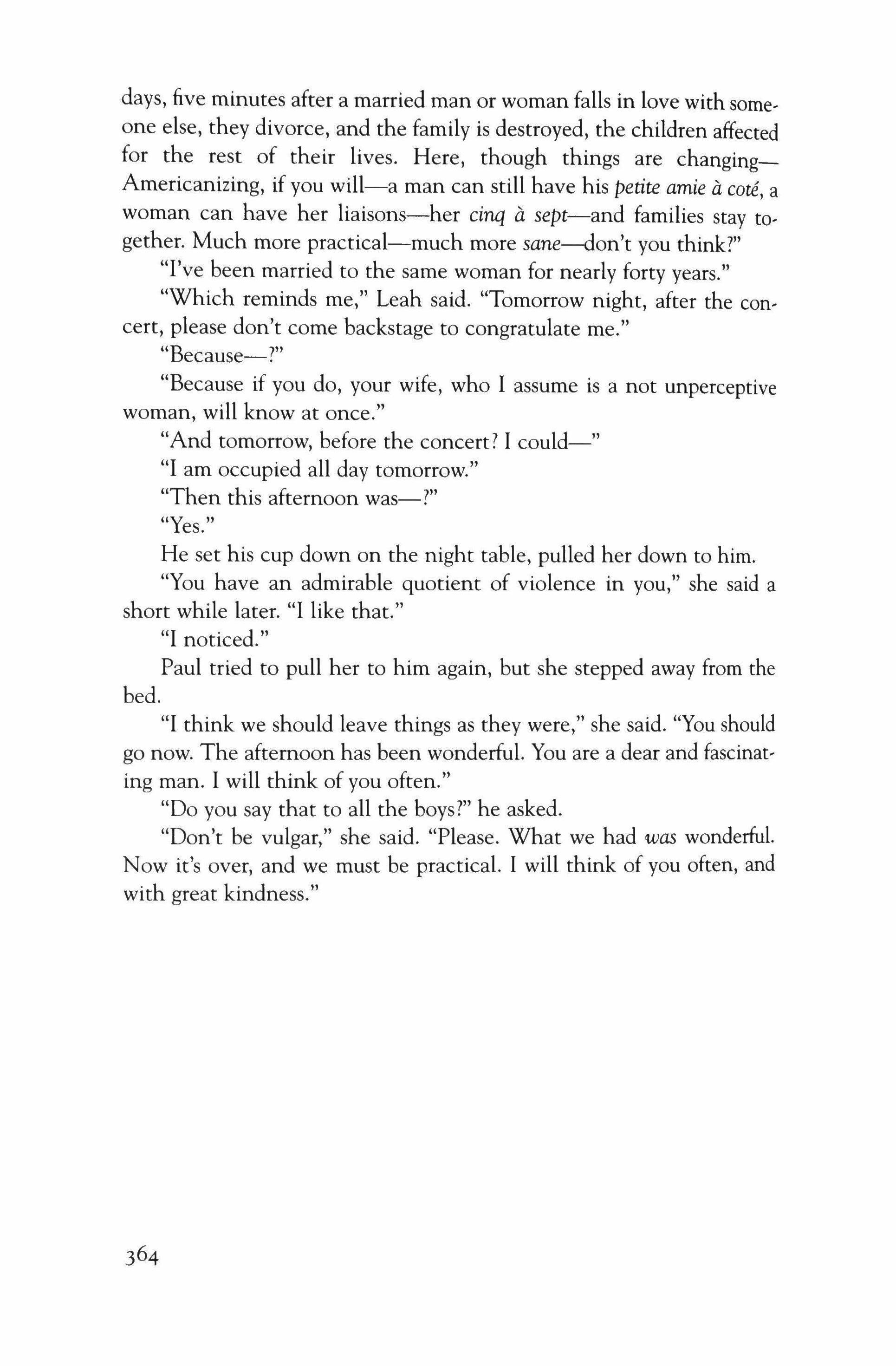
days, five minutes after a married man or woman falls in love with someone else, they divorce, and the family is destroyed, the children affected for the rest of their lives. Here, though things are changingAmericanizing, if you will-a man can still have his petite amie a cote, a woman can have her liaisons-her cinq a sept-and families stay together. Much more practical-much more sane--don't you think?"
"I've been married to the same woman for nearly forty years."
"Which reminds me," Leah said. "Tomorrow night, after the concert, please don't come backstage to congratulate me."
"Because-?"
"Because if you do, your wife, who I assume is a not unperceptive woman, will know at once."
"And tomorrow, before the concert? I could-" "I am occupied all day tomorrow."
"Then this afternoon was-?"
"Yes."
He set his cup down on the night table, pulled her down to him.
"You have an admirable quotient of violence in you," she said a short while later. "I like that."
"I noticed."
Paul tried to pull her to him again, but she stepped away from the bed.
"I think we should leave things as they were," she said. "You should go now. The afternoon has been wonderful. You are a dear and fascinating man. I will think of you often."
"Do you say that to all the boys?" he asked. "Don't be vulgar," she said. "Please. What we had was wonderful. Now it's over, and we must be practical. I will think of you often, and with great kindness."
Adam Stumacher
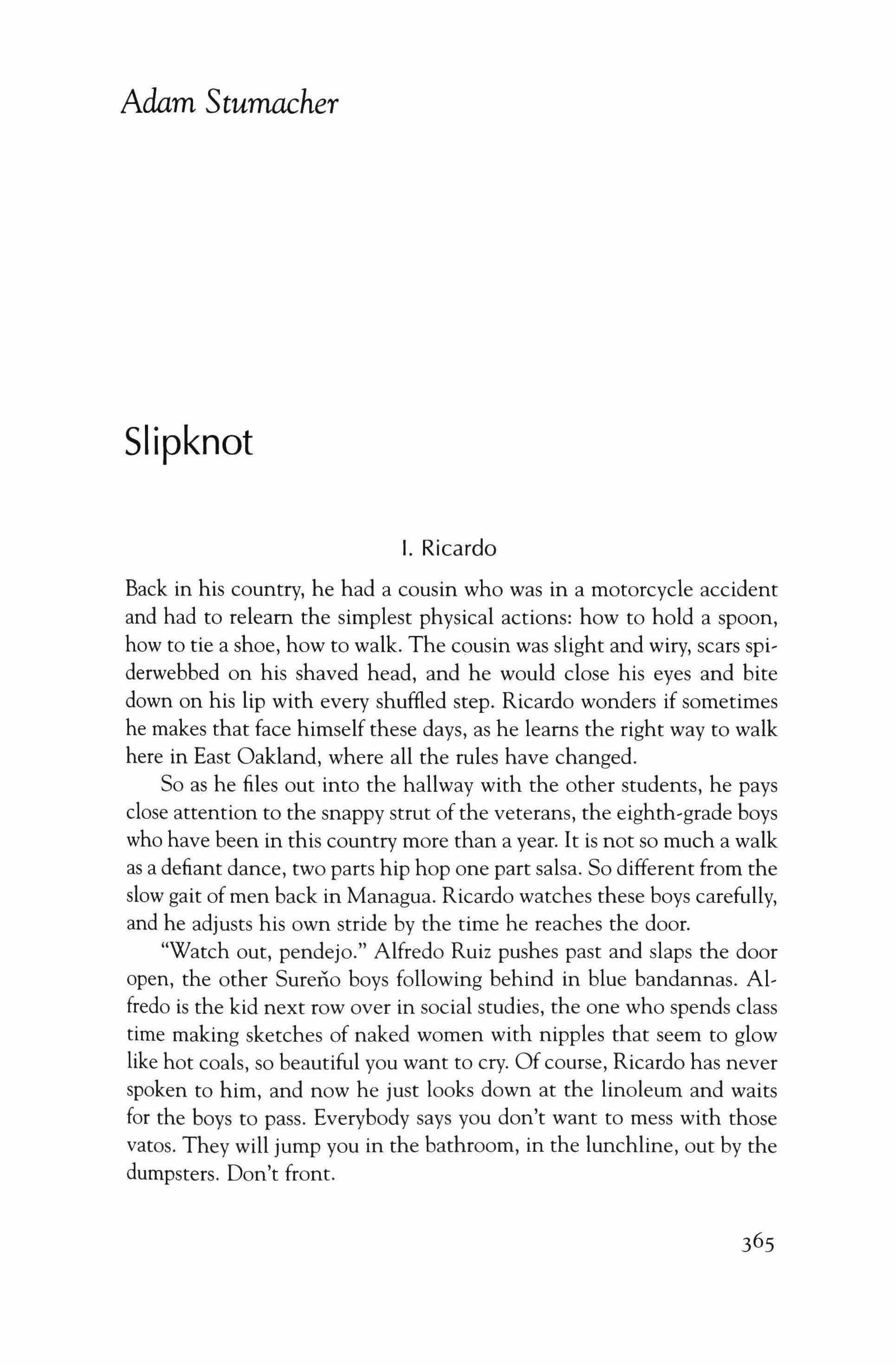
Slipknot
I.
Ricardo
Back in his country, he had a cousin who was in a motorcycle accident and had to relearn the simplest physical actions: how to hold a spoon, how to tie a shoe, how to walk. The cousin was slight and wiry, scars spiderwebbed on his shaved head, and he would close his eyes and bite down on his lip with every shuffled step. Ricardo wonders if sometimes he makes that face himself these days, as he learns the right way to walk here in East Oakland, where all the rules have changed.
So as he files out into the hallway with the other students, he pays close attention to the snappy strut of the veterans, the eighth,grade boys who have been in this country more than a year. It is not so much a walk as a defiant dance, two parts hip hop one part salsa. So different from the slow gait of men back in Managua. Ricardo watches these boys carefully, and he adjusts his own stride by the time he reaches the door.
"Watch out, pendejo." Alfredo Ruiz pushes past and slaps the door open, the other Surerio boys following behind in blue bandannas. AI, fredo is the kid next row over in social studies, the one who spends class time making sketches of naked women with nipples that seem to glow like hot coals, so beautiful you want to cry. Of course, Ricardo has never spoken to him, and now he just looks down at the linoleum and waits for the boys to pass. Everybody says you don't want to mess with those vatos. They will jump you in the bathroom, in the lunchline, out by the dumpsters. Don't front.

Ricardo remembers his father's rigid walk that final morning. Before sunrise they made their way towards the bus station, passing through the market where the indias were already setting up their stalls. Ricardo could feel the thousand-cordoba bill stitched inside his pant leg, his little sister's fingers gripped tight in his palm, and the stiff pride in his father's stride. Only temporary, his father said. He would be joining them soon, at the house of their tia in the North. And then the bus pulled away, Ricardo and his sister scrunched together in the wooden front seat. That was nine months ago.
As he follows the boys out, he notices that towel-head girl from prealgebra standing across the hallway. Her locker is open and she is checking out her reflection in a mirror fastened inside the door. Ricardo has never really looked at her before, and he is shocked to realize she is beautiful: baggy jeans, a tight Raiders jersey, swooping silver earrings, high cheekbones and long lashes framed in one of those black headscarves all towel-head girls wear.
On his way past, Alfredo pulls at the scarf from behind.
"Bin Ladin Bitch," somebody mutters.
She whips around, and the Surerio boys laugh, circling around her.
"That's not my name." The Bin Ladin Bitch fastens her scarf back into place, but she doesn't look down like she is supposed to. She makes her face firm as marble and turns slowly around the ring, meeting the eyes of each boy. Nobody says anything. Ricardo doesn't want to watch, but there is something familiar in the way she holds herself; he has seen these gestures somewhere before. So he finds himself drawing to the outside of the circle.
"Hahmuna hohmuna hahmuna," Alfredo makes mock Arabic sounds, and the other boys take up the chant. One scrawny kid pulls his sweatshirt hood up over his head and starts kneeling and bowing, and all the boys laugh. Then somebody reaches up and tugs hard at the scarf again. Traffic in the hallway has stopped and everybody crowds around, jostling Ricardo until he almost drops his backpack.
"Fight! Fight!" Around the outside of the ring, little sixth graders jump up to see the action.
Ricardo holds his breath, but the Bin Ladin Bitch doesn't do anything. She doesn't pound her fists into their leering faces and pull at their sleek hair. She doesn't let out a howl and leap onto Alfredo, biting his cheek until it bleeds. She doesn't pile drive the scrawny kid when he leans down to bow. She doesn't even reach up to fix the scarf. She just stands there with her face stiff, only her eyes flashing around the crowd,
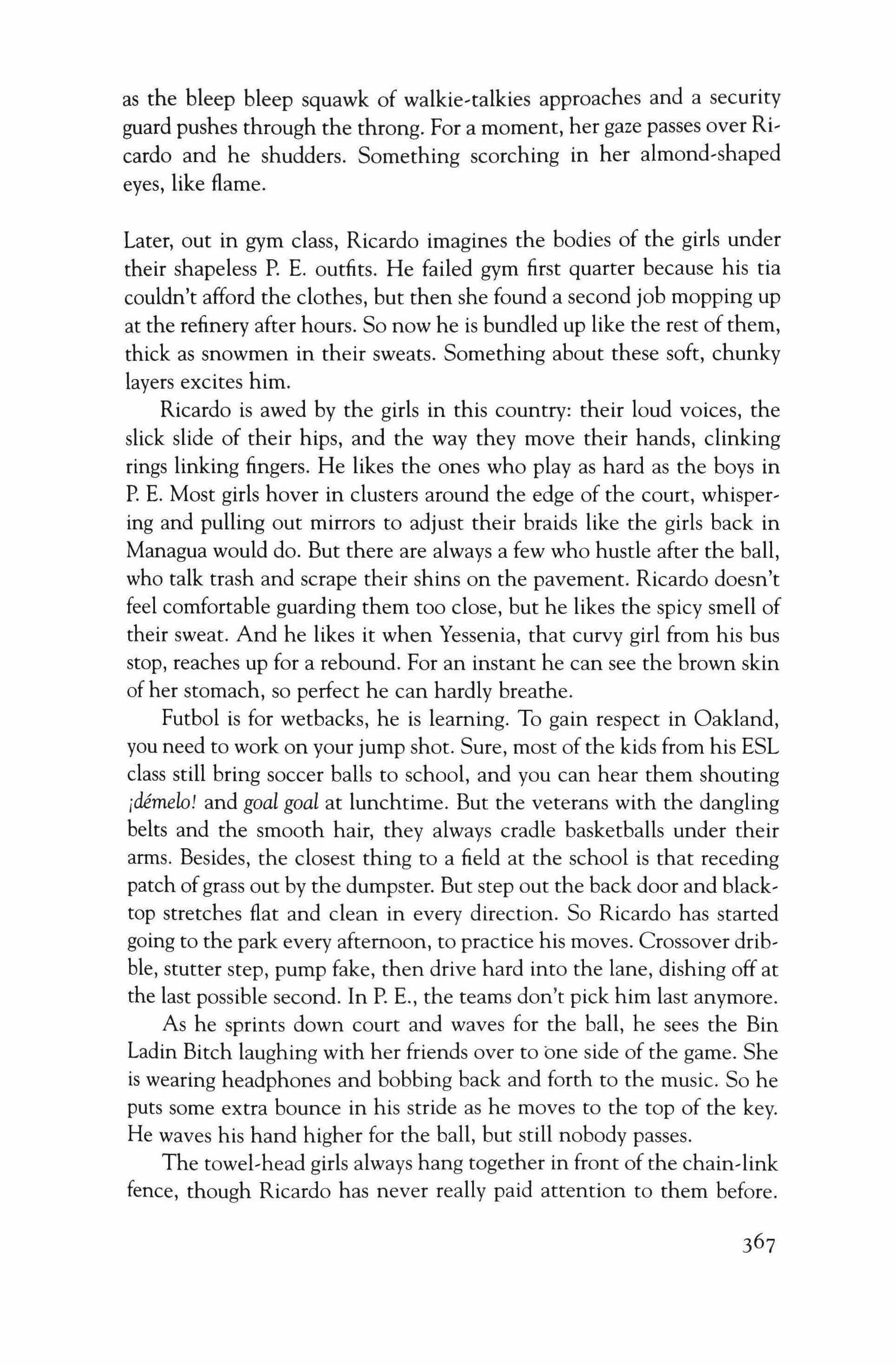
as the bleep bleep squawk of walkie-talkies approaches and a security guard pushes through the throng. For a moment, her gaze passes over Ricardo and he shudders. Something scorching in her almond-shaped eyes, like flame.
Later, out in gym class, Ricardo imagines the bodies of the girls under their shapeless P. E. outfits. He failed gym first quarter because his tia couldn't afford the clothes, but then she found a second job mopping up at the refinery after hours. So now he is bundled up like the rest of them, thick as snowmen in their sweats. Something about these soft, chunky layers excites him.
Ricardo is awed by the girls in this country: their loud voices, the slick slide of their hips, and the way they move their hands, clinking rings linking fingers. He likes the ones who playas hard as the boys in P. E. Most girls hover in clusters around the edge of the court, whispering and pulling out mirrors to adjust their braids like the girls back in Managua would do. But there are always a few who hustle after the ball, who talk trash and scrape their shins on the pavement. Ricardo doesn't feel comfortable guarding them too close, but he likes the spicy smell of their sweat. And he likes it when Yessenia, that curvy girl from his bus stop, reaches up for a rebound. For an instant he can see the brown skin of her stomach, so perfect he can hardly breathe.
Futbol is for wetbacks, he is learning. To gain respect in Oakland, you need to work on your jump shot. Sure, most of the kids from his ESL class still bring soccer balls to school, and you can hear them shouting jdemelo! and goal goal at lunchtime. But the veterans with the dangling belts and the smooth hair, they always cradle basketballs under their arms. Besides, the closest thing to a field at the school is that receding patch ofgrass out by the dumpster. But step out the back door and blacktop stretches flat and clean in every direction. So Ricardo has started going to the park every afternoon, to practice his moves. Crossover dribble, stutter step, pump fake, then drive hard into the lane, dishing off at the last possible second. In P. E., the teams don't pick him last anymore.
As he sprints down court and waves for the ball, he sees the Bin Ladin Bitch laughing with her friends over to one side of the game. She is wearing headphones and bobbing back and forth to the music. So he puts some extra bounce in his stride as he moves to the top of the key. He waves his hand higher for the ball, but still nobody passes.
The towel-head girls always hang together in front of the chain-link fence, though Ricardo has never really paid attention to them before.
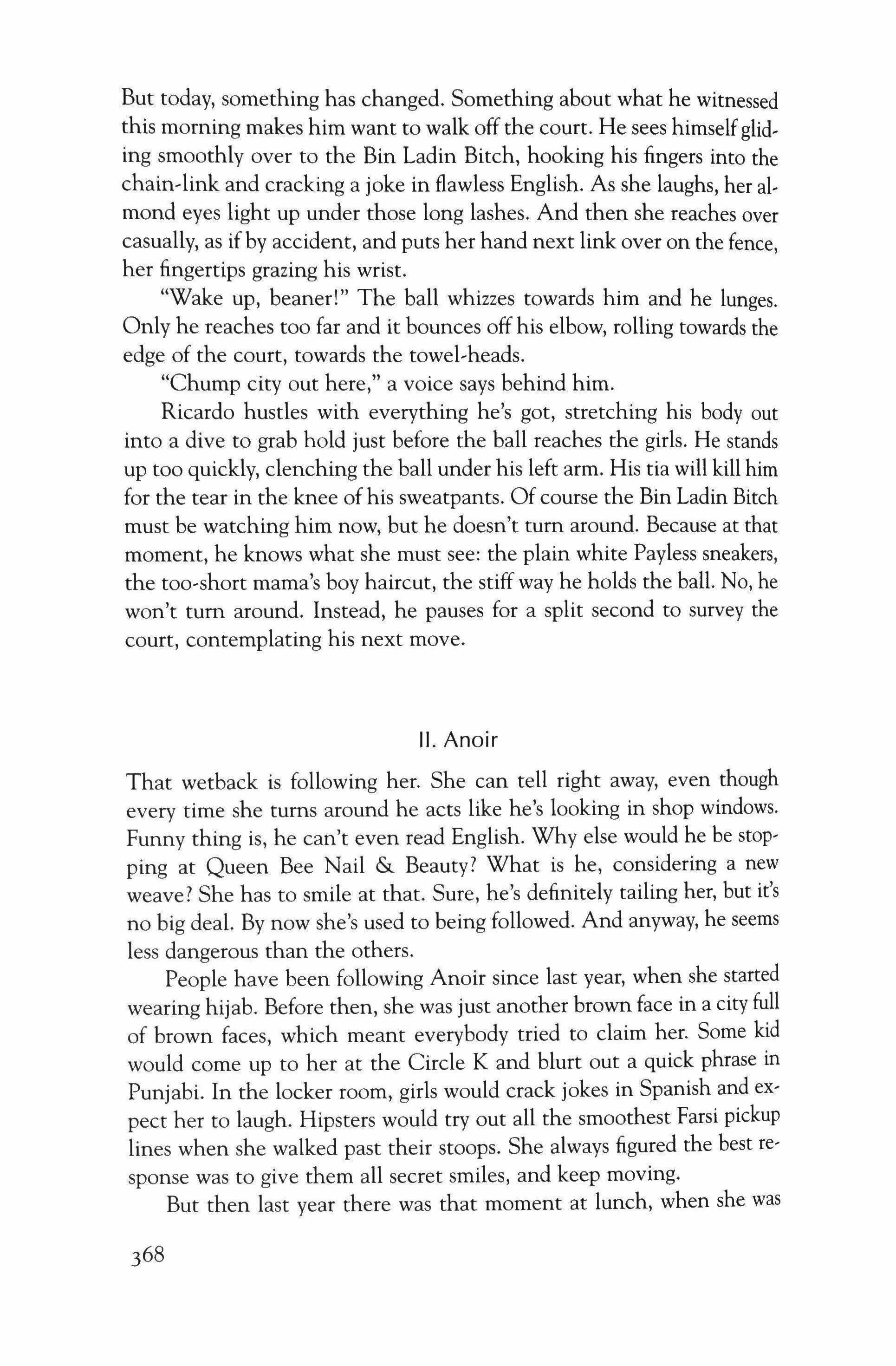
But today, something has changed. Something about what he witnessed this morning makes him want to walk off the court. He sees himselfgliding smoothly over to the Bin Ladin Bitch, hooking his fingers into the chain-link and cracking a joke in flawless English. As she laughs, her almond eyes light up under those long lashes. And then she reaches over casually, as ifby accident, and puts her hand next link over on the fence, her fingertips grazing his wrist.
"Wake up, beaner!" The ball whizzes towards him and he lunges. Only he reaches too far and it bounces off his elbow, rolling towards the edge of the court, towards the towel-heads.
"Chump city out here," a voice says behind him.
Ricardo hustles with everything he's got, stretching his body out into a dive to grab hold just before the ball reaches the girls. He stands up too quickly, clenching the ball under his left arm. His tia will kill him for the tear in the knee ofhis sweatpants. Of course the Bin Ladin Bitch must be watching him now, but he doesn't turn around. Because at that moment, he knows what she must see: the plain white Payless sneakers, the too-short mama's boy haircut, the stiff way he holds the ball. No, he won't turn around. Instead, he pauses for a split second to survey the court, contemplating his next move.
II. Anoir
That wetback is following her. She can tell right away, even though every time she turns around he acts like he's looking in shop windows. Funny thing is, he can't even read English. Why else would he be stopping at Queen Bee Nail & Beauty? What is he, considering a new weave? She has to smile at that. Sure, he's definitely tailing her, but it's no big deal. By now she's used to being followed. And anyway, he seems less dangerous than the others.
People have been following Anoir since last year, when she started wearing hijab. Before then, she was just another brown face in a city full of brown faces, which meant everybody tried to claim her. Some kid would come up to her at the Circle K and blurt out a quick phrase in Punjabi. In the locker room, girls would crack jokes in Spanish and expect her to laugh. Hipsters would try out all the smoothest Farsi pickup lines when she walked past their stoops. She always figured the best response was to give them all secret smiles, and keep moving.
But then last year there was that moment at lunch, when she was
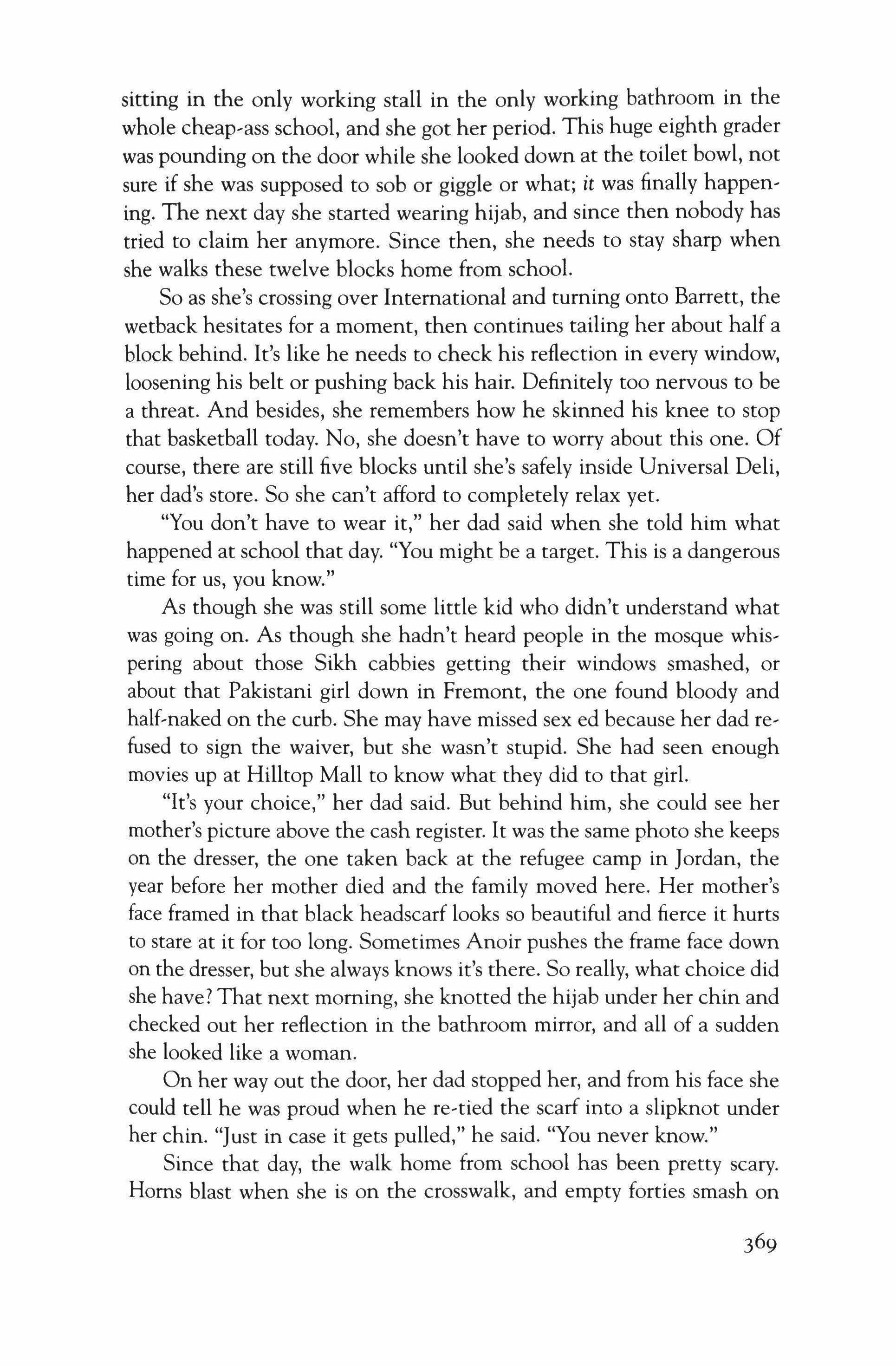
sitting in the only working stall in the only working bathroom in the whole cheap-ass school, and she got her period. This huge eighth grader was pounding on the door while she looked down at the toilet bowl, not sure if she was supposed to sob or giggle or what; it was finally happening. The next day she started wearing hijab, and since then nobody has tried to claim her anymore. Since then, she needs to stay sharp when she walks these twelve blocks home from school.
So as she's crossing over International and turning onto Barrett, the wetback hesitates for a moment, then continues tailing her about half a block behind. It's like he needs to check his reflection in every window, loosening his belt or pushing back his hair. Definitely too nervous to be a threat. And besides, she remembers how he skinned his knee to stop that basketball today. No, she doesn't have to worry about this one. Of course, there are still five blocks until she's safely inside Universal Deli, her dad's store. So she can't afford to completely relax yet.
"You don't have to wear it," her dad said when she told him what happened at school that day. "You might be a target. This is a dangerous time for us, you know."
As though she was still some little kid who didn't understand what was going on. As though she hadn't heard people in the mosque whispering about those Sikh cabbies getting their windows smashed, or about that Pakistani girl down in Fremont, the one found bloody and half-naked on the curb. She may have missed sex ed because her dad refused to sign the waiver, but she wasn't stupid. She had seen enough movies up at Hilltop Mall to know what they did to that girl.
"It's your choice," her dad said. But behind him, she could see her mother's picture above the cash register. It was the same photo she keeps on the dresser, the one taken back at the refugee camp in Jordan, the year before her mother died and the family moved here. Her mother's face framed in that black headscarf looks so beautiful and fierce it hurts to stare at it for too long. Sometimes Anoir pushes the frame face down on the dresser, but she always knows it's there. So really, what choice did she have? That next morning, she knotted the hijab under her chin and checked out her reflection in the bathroom mirror, and all of a sudden she looked like a woman.
On her way out the door, her dad stopped her, and from his face she could tell he was proud when he re-tied the scarf into a slipknot under her chin. "Just in case it gets pulled," he said. "You never know."
Since that day, the walk home from school has been pretty scary. Horns blast when she is on the crosswalk, and empty forties smash on

the pavement in front of her. Impalas cruise by slow so the passengers can shout out the windows, and souped-up Civics full of Vietnamese gang-bangers crank up the bass until she feels the vibrations way down in her spine. One time this crew of cholos followed at her heels the whole way from the KFC parking lot, so close she could smell their cheap-ass cologne. And last month this white pickup tailed her all the way along Barrett and then circled four times around the block while she sat pretending to wait for the bus. So basically, these days she tries to avoid walking horne alone.
Problem is, today in sixth period Stephanie Saechao, her next-door neighbor and best friend, called Mr. Glover a fag. Mr. Glover is the permanent sub who took over science this year, because the real teacher quit after the first week. Everybody says he's a fag because he wears tight pants and V-neck sweaters, and he walks that way. Whatever, at least he's made it four months without quitting. Anoir doesn't see what the big deal is because everybody knows what Stephanie said is the straightup truth, but sometimes people can be real particular about language. So anyway, they made Stephanie stay after school to pick up trash in the cafeteria, which means Anoir is completely alone on her walk home today, except for the wetback. In a way she is grateful for his presence.
Finally she makes it to the Universal Deli, with the stars and stripes displayed front-and-center in the window. So everybody knows which side we're on, her dad said. By now the wetback has closed the gap to maybe fifteen feet, and out the comer of her eye she sees him stop and look desperately around for some sort of cover. She finds herself smiling again, and before she can stop and think, she has turned around and started walking towards him.
"Hey! Hey! What's your name?"
But she doesn't even get a chance to finish the question. The wetback has already turned and started sprinting back down the sidewalk, pumping his arms hard like he's frantic to catch up with a loose basketball, to prevent some sort of disaster.
Out above the refinery stacks, the sky is already getting dark by the time Anoir sets herself up with a stack of pita and a bowl of zatar, a textbook open on the counter in front of her. Her dad has another headache so he went up in the apartment to rest, which gave her a chance to grab a bottle of Pepsi and stash it under her chair. She takes a sip and closes her eyes for a second as she breathes in the comfortable smells of the store: cardamom, roasted garlic, nacho-cheese-flavored Doritos.
370
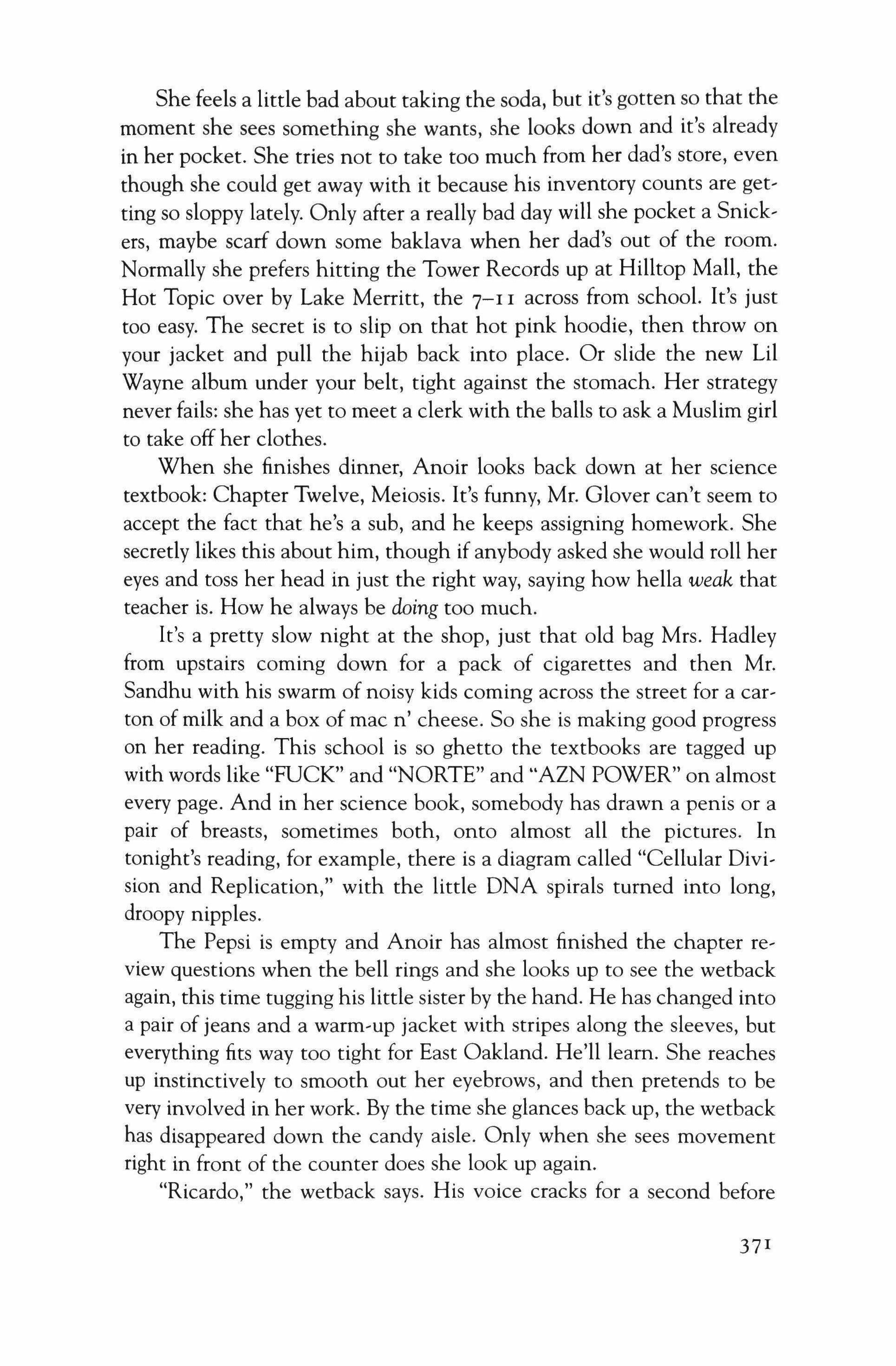
She feels a little bad about taking the soda, but it's gotten so that the moment she sees something she wants, she looks down and it's already in her pocket. She tries not to take too much from her dad's store, even though she could get away with it because his inventory counts are get' ting so sloppy lately. Only after a really bad day will she pocket a Snick, ers, maybe scarf down some baklava when her dad's out of the room. Normally she prefers hitting the Tower Records up at Hilltop Mall, the Hot Topic over by Lake Merritt, the 7-11 across from school. It's just too easy. The secret is to slip on that hot pink hoodie, then throw on your jacket and pull the hijab back into place. Or slide the new Lil Wayne album under your belt, tight against the stomach. Her strategy never fails: she has yet to meet a clerk with the balls to ask a Muslim girl to take off her clothes.
When she finishes dinner, Anoir looks back down at her science textbook: Chapter Twelve, Meiosis. It's funny, Mr. Glover can't seem to accept the fact that he's a sub, and he keeps assigning homework. She secretly likes this about him, though if anybody asked she would roll her eyes and toss her head in just the right way, saying how hella weak that teacher is. How he always be doing too much.
It's a pretty slow night at the shop, just that old bag Mrs. Hadley from upstairs coming down for a pack of cigarettes and then Mr. Sandhu with his swarm of noisy kids coming across the street for a car, ton of milk and a box of mac n' cheese. So she is making good progress on her reading. This school is so ghetto the textbooks are tagged up with words like "FUCK" and "NORTE" and "AZN POWER" on almost every page. And in her science book, somebody has drawn a penis or a pair of breasts, sometimes both, onto almost all the pictures. In tonight's reading, for example, there is a diagram called "Cellular Division and Replication," with the little DNA spirals turned into long, droopy nipples.
The Pepsi is empty and Anoir has almost finished the chapter review questions when the bell rings and she looks up to see the wetback again, this time tugging his little sister by the hand. He has changed into a pair of jeans and a warm'up jacket with stripes along the sleeves, but everything fits way too tight for East Oakland. He'll learn. She reaches up instinctively to smooth out her eyebrows, and then pretends to be very involved in her work. By the time she glances back up, the wetback has disappeared down the candy aisle. Only when she sees movement right in front of the counter does she look up again.
"Ricardo," the wetback says. His voice cracks for a second before
371
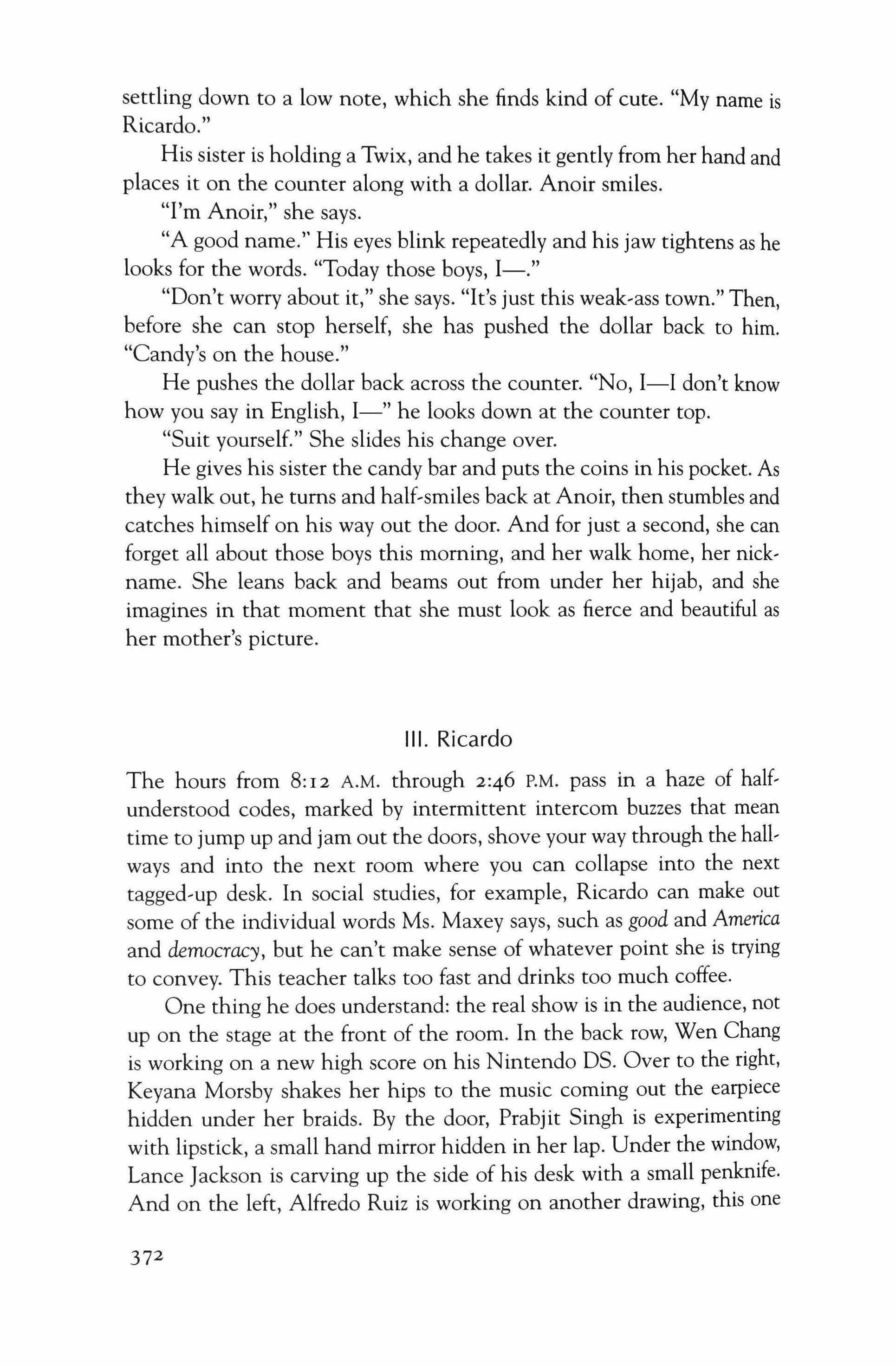
settling down to a low note, which she finds kind of cute. "My name is Ricardo."
His sister is holding aTwix, and he takes it gently from her hand and places it on the counter along with a dollar. Anoir smiles.
"I'm Anoir," she says.
"A good name." His eyes blink repeatedly and his jaw tightens as he looks for the words. "Today those boys, 1-."
"Don't worry about it," she says. "It's just this weak-ass town." Then, before she can stop herself, she has pushed the dollar back to him. "Candy's on the house."
He pushes the dollar back across the counter. "No, I-I don't know how you say in English, 1-" he looks down at the counter top.
"Suit yourself." She slides his change over.
He gives his sister the candy bar and puts the coins in his pocket. As they walk out, he turns and half-smiles back at Anoir, then stumbles and catches himself on his way out the door. And for just a second, she can forget all about those boys this morning, and her walk home, her nickname. She leans back and beams out from under her hijab, and she imagines in that moment that she must look as fierce and beautiful as her mother's picture.
III. Ricardo
The hours from 8: I 2 A.M. through 2:46 P.M. pass in a haze of halfunderstood codes, marked by intermittent intercom buzzes that mean time to jump up and jam out the doors, shove your way through the hallways and into the next room where you can collapse into the next tagged-up desk. In social studies, for example, Ricardo can make out some of the individual words Ms. Maxey says, such as good and America and democracy, but he can't make sense of whatever point she is trying to convey. This teacher talks too fast and drinks too much coffee.
One thing he does understand: the real show is in the audience, not up on the stage at the front of the room. In the back row, Wen Chang is working on a new high score on his Nintendo DS. Over to the right, Keyana Morsby shakes her hips to the music coming out the earpiece hidden under her braids. By the door, Prabjit Singh is experimenting with lipstick, a small hand mirror hidden in her lap. Under the window, Lance Jackson is carving up the side of his desk with a small penknife. And on the left, Alfredo Ruiz is working on another drawing, this one
372
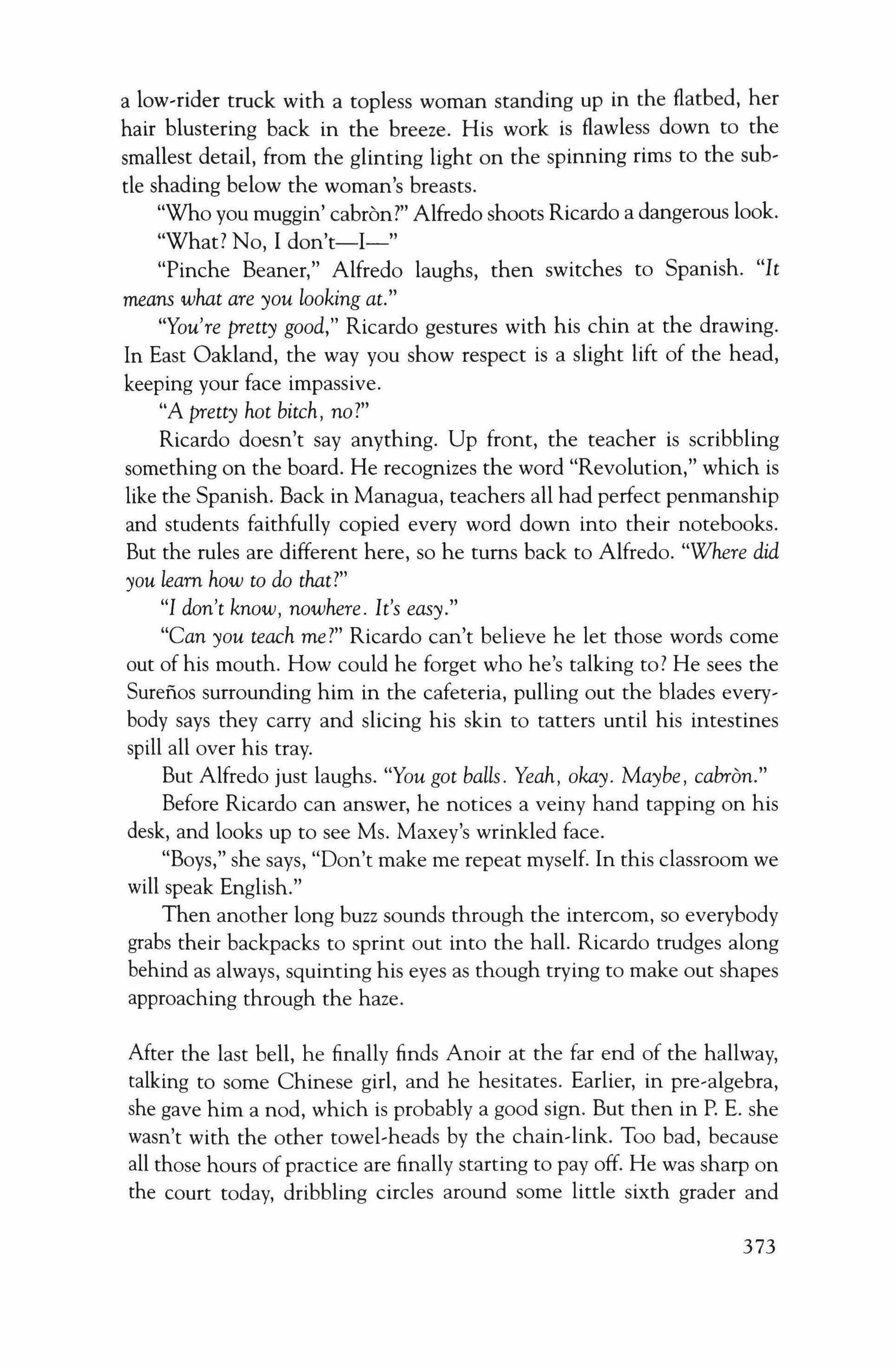
a low-rider truck with a topless woman standing up in the flatbed, her hair blustering back in the breeze. His work is flawless down to the smallest detail, from the glinting light on the spinning rims to the sub, de shading below the woman's breasts.
"Who you muggin' cabron?" Alfredo shoots Ricardo a dangerous look.
"What? No, I don't-I-"
"Pinche Beaner," Alfredo laughs, then switches to Spanish. "It means what are you looking at."
"You're pretty good," Ricardo gestures with his chin at the drawing. In East Oakland, the way you show respect is a slight lift of the head, keeping your face impassive.
"A pretty hot bitch, no?"
Ricardo doesn't say anything. Up front, the teacher is scribbling something on the board. He recognizes the word "Revolution," which is like the Spanish. Back in Managua, teachers all had perfect penmanship and students faithfully copied every word down into their notebooks. But the rules are different here, so he turns back to Alfredo. "Where did you learn how to do that?"
"I don't know, nowhere. It's easy."
"Can you teach me?" Ricardo can't believe he let those words come out of his mouth. How could he forget who he's talking to? He sees the Surefios surrounding him in the cafeteria, pulling out the blades every' body says they carry and slicing his skin to tatters until his intestines spill all over his tray.
But Alfredo just laughs. "You got balls. Yeah, okay. Maybe, cabron."
Before Ricardo can answer, he notices a veiny hand tapping on his desk, and looks up to see Ms. Maxey's wrinkled face.
"Boys," she says, "Don't make me repeat myself. In this classroom we will speak English."
Then another long buzz sounds through the intercom, so everybody grabs their backpacks to sprint out into the hall. Ricardo trudges along behind as always, squinting his eyes as though trying to make out shapes approaching through the haze.
After the last bell, he finally finds Anoir at the far end of the hallway, talking to some Chinese girl, and he hesitates. Earlier, in pre-algebra, she gave him a nod, which is probably a good sign. But then in P. E. she wasn't with the other towel-heads by the chain,link. Too bad, because all those hours of practice are finally starting to payoff. He was sharp on the court today, dribbling circles around some little sixth grader and
373
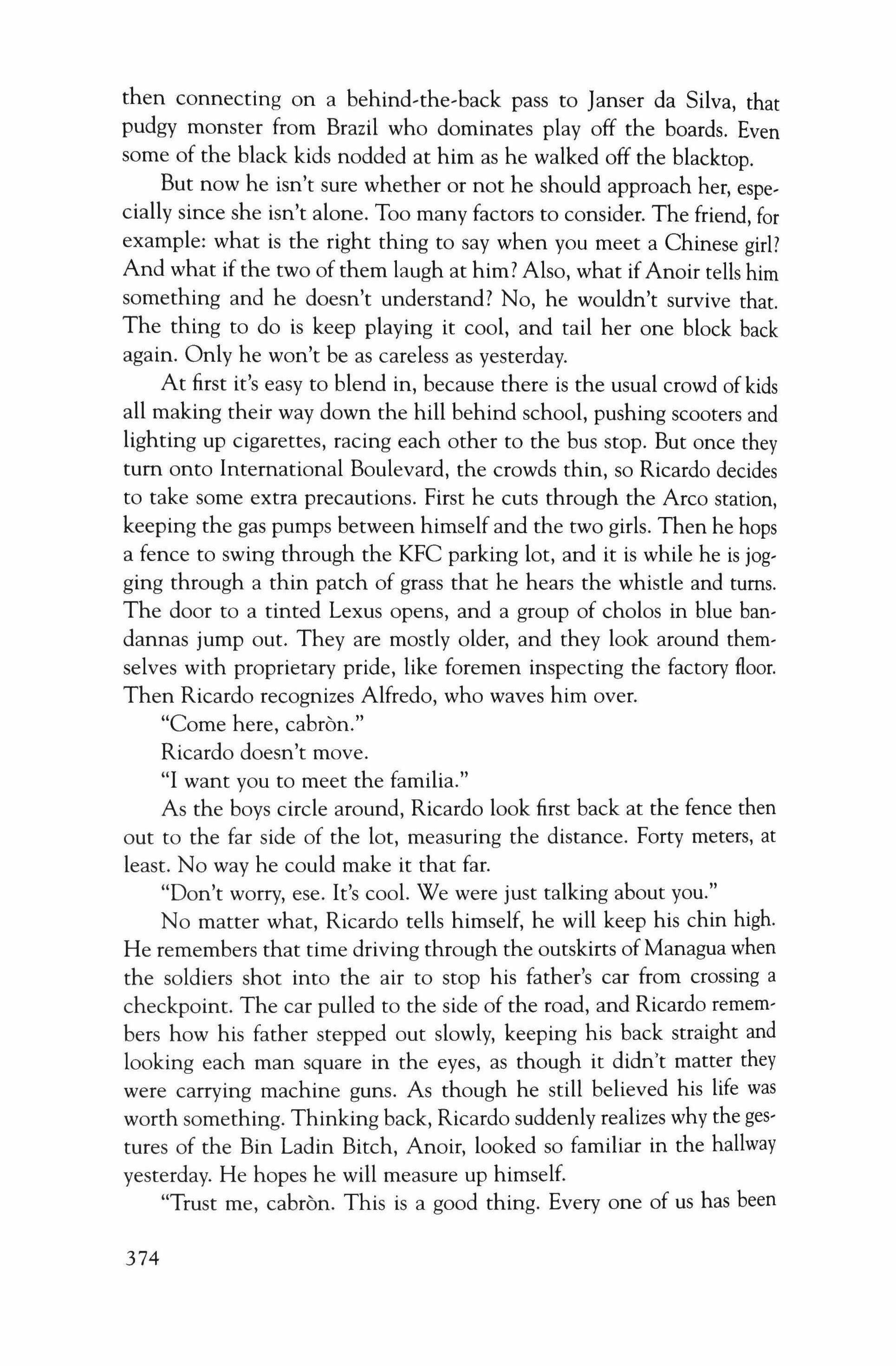
then connecting on a behind-the-back pass to Janser da Silva, that pudgy monster from Brazil who dominates playoff the boards. Even some of the black kids nodded at him as he walked off the blacktop.
But now he isn't sure whether or not he should approach her, especially since she isn't alone. Too many factors to consider. The friend, for example: what is the right thing to say when you meet a Chinese girl? And what if the two of them laugh at him? Also, what ifAnoir tells him something and he doesn't understand? No, he wouldn't survive that. The thing to do is keep playing it cool, and tail her one block back again. Only he won't be as careless as yesterday.
At first it's easy to blend in, because there is the usual crowd of kids all making their way down the hill behind school, pushing scooters and lighting up cigarettes, racing each other to the bus stop. But once they turn onto International Boulevard, the crowds thin, so Ricardo decides to take some extra precautions. First he cuts through the Arco station, keeping the gas pumps between himself and the two girls. Then he hops a fence to swing through the KFC parking lot, and it is while he is jogging through a thin patch of grass that he hears the whistle and turns. The door to a tinted Lexus opens, and a group of cholos in blue bandannas jump out. They are mostly older, and they look around themselves with proprietary pride, like foremen inspecting the factory floor. Then Ricardo recognizes Alfredo, who waves him over.
"Come here, cabron."
Ricardo doesn't move.
"I want you to meet the familia."
As the boys circle around, Ricardo look first back at the fence then out to the far side of the lot, measuring the distance. Forty meters, at least. No way he could make it that far.
"Don't worry, ese. It's cool. We were just talking about you."
No matter what, Ricardo tells himself, he will keep his chin high. He remembers that time driving through the outskirts of Managua when the soldiers shot into the air to stop his father's car from crossing a checkpoint. The car pulled to the side of the road, and Ricardo remembers how his father stepped out slowly, keeping his back straight and looking each man square in the eyes, as though it didn't matter they were carrying machine guns. As though he still believed his life was worth something. Thinking back, Ricardo suddenly realizes why the gestures of the Bin Ladin Bitch, Anoir, looked so familiar in the hallway yesterday. He hopes he will measure up himself.
"Trust me, cabron. This is a good thing. Every one of us has been
374
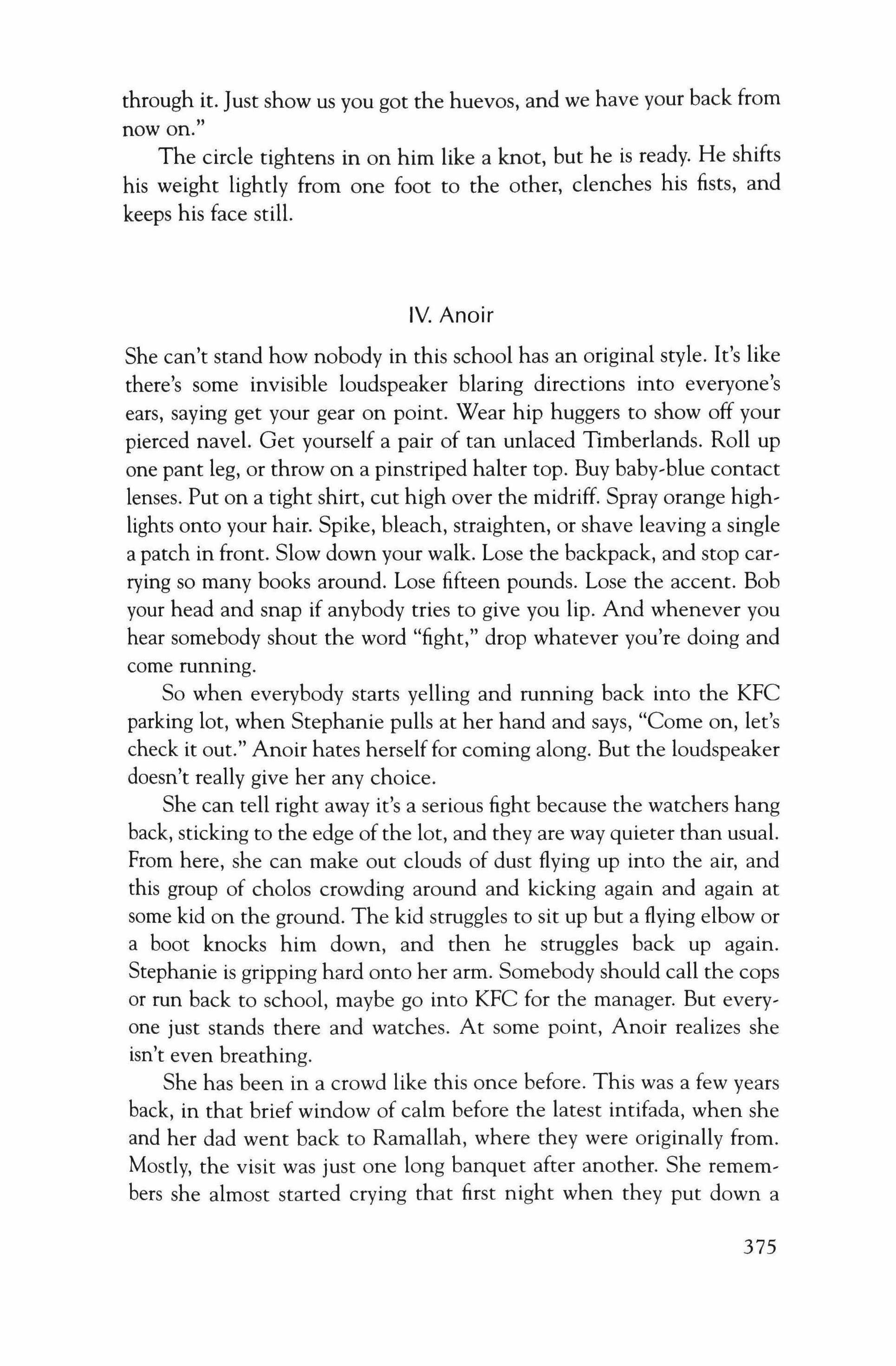
through it. Just show us you got the huevos, and we have your back from now on."
The circle tightens in on him like a knot, but he is ready. He shifts his weight lightly from one foot to the other, clenches his fists, and keeps his face still.
IV. Anoir
She can't stand how nobody in this school has an original style. It's like there's some invisible loudspeaker blaring directions into everyone's ears, saying get your gear on point. Wear hip huggers to show off your pierced navel. Get yourself a pair of tan unlaced Timberlands. Roll up one pant leg, or throw on a pinstriped halter top. Buy baby-blue contact lenses. Put on a tight shirt, cut high over the midriff. Spray orange highlights onto your hair. Spike, bleach, straighten, or shave leaving a single a patch in front. Slow down your walk. Lose the backpack, and stop carrying so many books around. Lose fifteen pounds. Lose the accent. Bob your head and snap if anybody tries to give you lip. And whenever you hear somebody shout the word "fight," drop whatever you're doing and come running.
So when everybody starts yelling and running back into the KFC parking lot, when Stephanie pulls at her hand and says, "Come on, let's check it out." Anoir hates herselffor coming along. But the loudspeaker doesn't really give her any choice.
She can tell right away it's a serious fight because the watchers hang back, sticking to the edge of the lot, and they are way quieter than usual. From here, she can make out clouds of dust flying up into the air, and this group of cholos crowding around and kicking again and again at some kid on the ground. The kid struggles to sit up but a flying elbow or a boot knocks him down, and then he struggles back up again. Stephanie is gripping hard onto her arm. Somebody should call the cops or run back to school, maybe go into KFC for the manager. But everyone just stands there and watches. At some point, Anoir realizes she isn't even breathing.
She has been in a crowd like this once before. This was a few years back, in that brief window of calm before the latest intifada, when she and her dad went back to Ramallah, where they were originally from. Mostly, the visit was just one long banquet after another. She remernbers she almost started crying that first night when they put down a
375
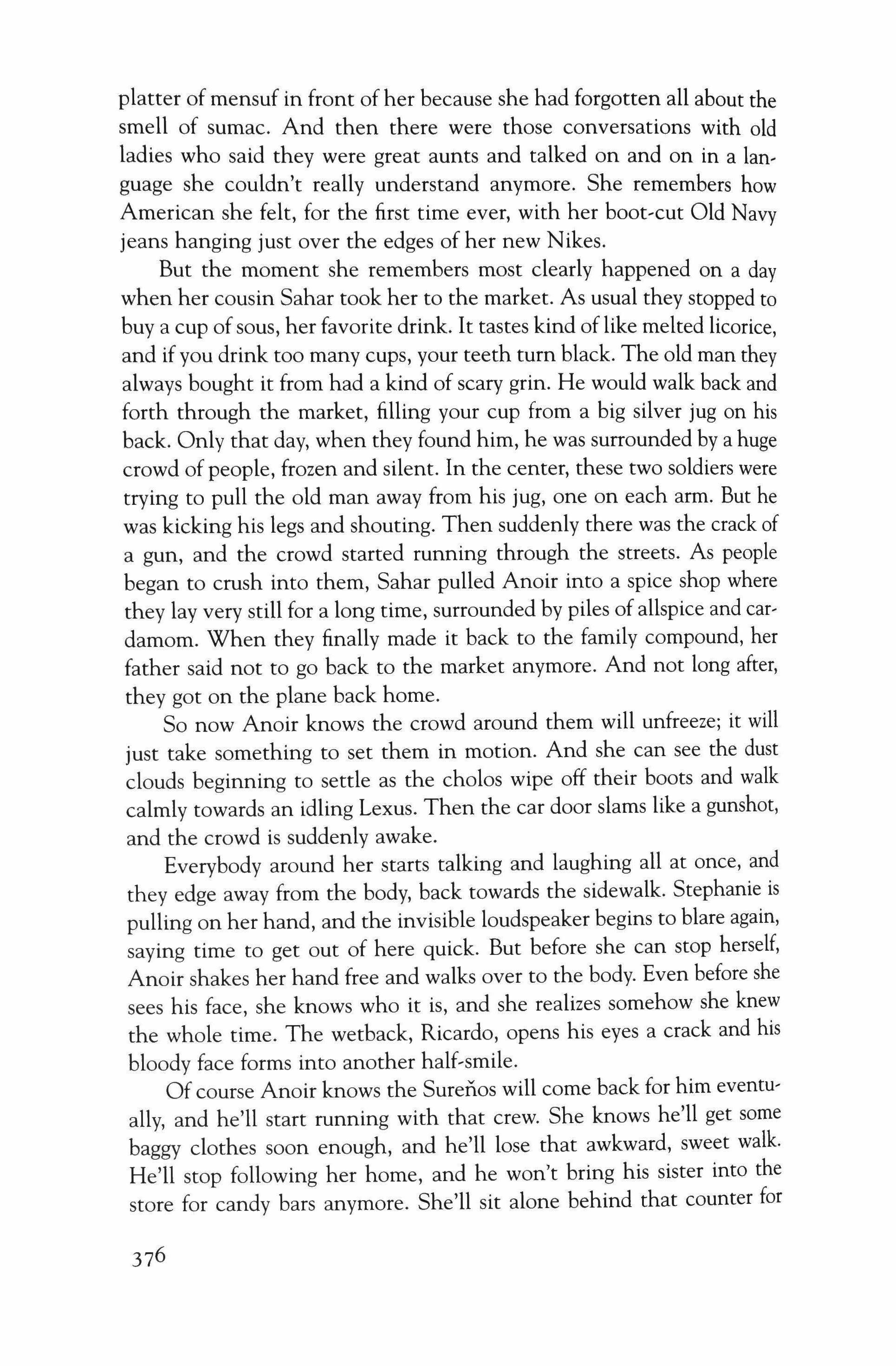
platter of mensuf in front of her because she had forgotten all about the smell of sumac. And then there were those conversations with old ladies who said they were great aunts and talked on and on in a language she couldn't really understand anymore. She remembers how American she felt, for the first time ever, with her boot-cut Old Navy jeans hanging just over the edges of her new Nikes.
But the moment she remembers most clearly happened on a day when her cousin Sahar took her to the market. As usual they stopped to buy a cup of sous, her favorite drink. It tastes kind of like melted licorice, and if you drink too many cups, your teeth turn black. The old man they always bought it from had a kind of scary grin. He would walk back and forth through the market, filling your cup from a big silver jug on his back. Only that day, when they found him, he was surrounded by a huge crowd of people, frozen and silent. In the center, these two soldiers were trying to pull the old man away from his jug, one on each arm. But he was kicking his legs and shouting. Then suddenly there was the crack of a gun, and the crowd started running through the streets. As people began to crush into them, Sahar pulled Anoir into a spice shop where they lay very still for a long time, surrounded by piles of allspice and cardamom. When they finally made it back to the family compound, her father said not to go back to the market anymore. And not long after, they got on the plane back home.
So now Anoir knows the crowd around them will unfreeze; it will just take something to set them in motion. And she can see the dust clouds beginning to settle as the cholos wipe off their boots and walk calmly towards an idling Lexus. Then the car door slams like a gunshot, and the crowd is suddenly awake.
Everybody around her starts talking and laughing all at once, and they edge away from the body, back towards the sidewalk. Stephanie is pulling on her hand, and the invisible loudspeaker begins to blare again, saying time to get out of here quick. But before she can stop herself, Anoir shakes her hand free and walks over to the body. Even before she sees his face, she knows who it is, and she realizes somehow she knew the whole time. The wetback, Ricardo, opens his eyes a crack and his bloody face forms into another half-smile.
Of course Anoir knows the Surerios will come back for him eventually, and he'll start running with that crew. She knows he'll get some baggy clothes soon enough, and he'll lose that awkward, sweet walk. He'll stop following her home, and he won't bring his sister into the store for candy bars anymore. She'll sit alone behind that counter for
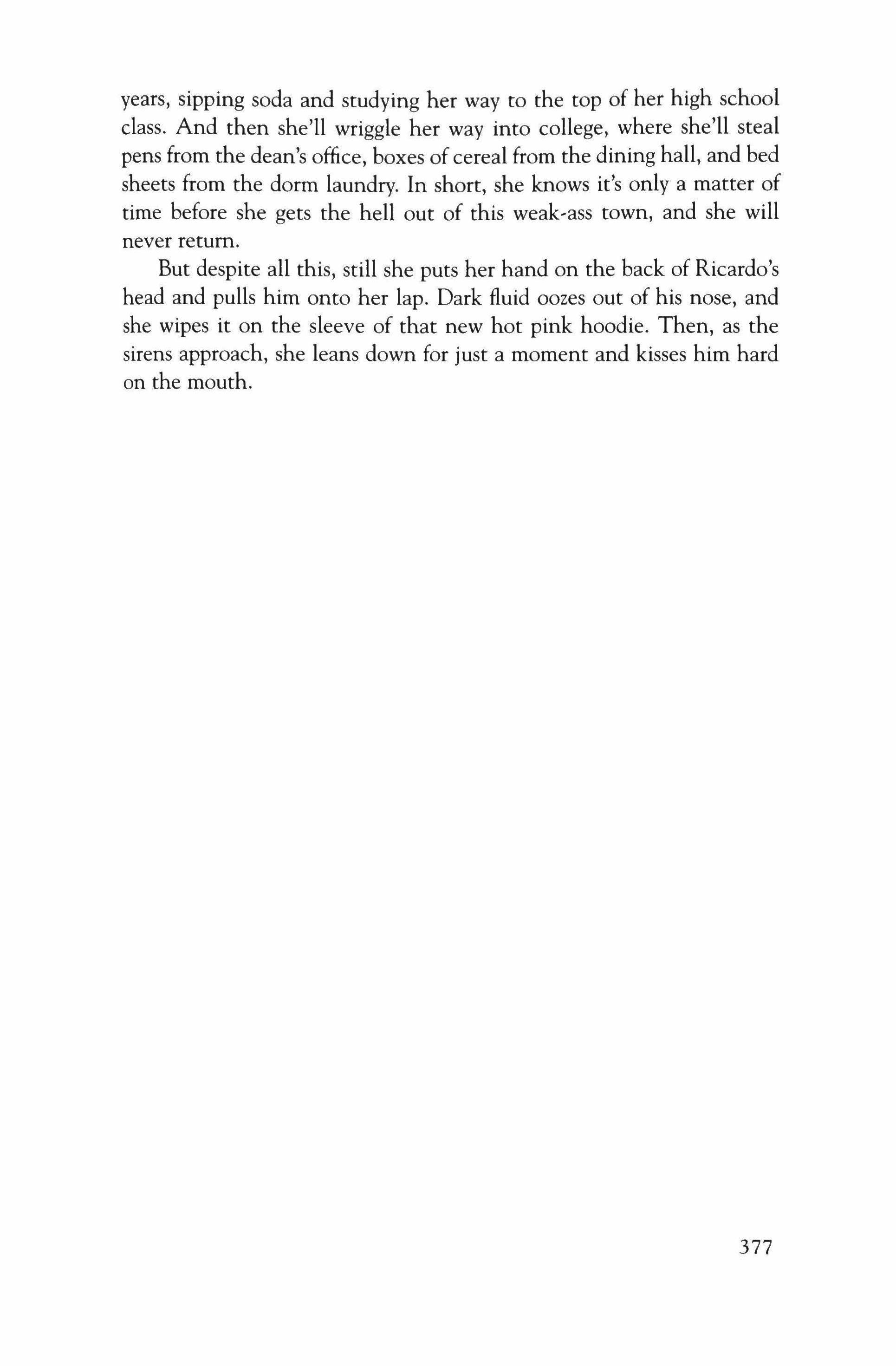
years, sipping soda and studying her way to the top of her high school class. And then she'll wriggle her way into college, where she'll steal pens from the dean's office, boxes of cereal from the dining hall, and bed sheets from the dorm laundry. In short, she knows it's only a matter of time before she gets the hell out of this weak-ass town, and she will never return.
But despite all this, still she puts her hand on the back of Ricardo's head and pulls him onto her lap. Dark fluid oozes out of his nose, and she wipes it on the sleeve of that new hot pink hoodie. Then, as the sirens approach, she leans down for just a moment and kisses him hard on the mouth.
377
Glen Pourciau
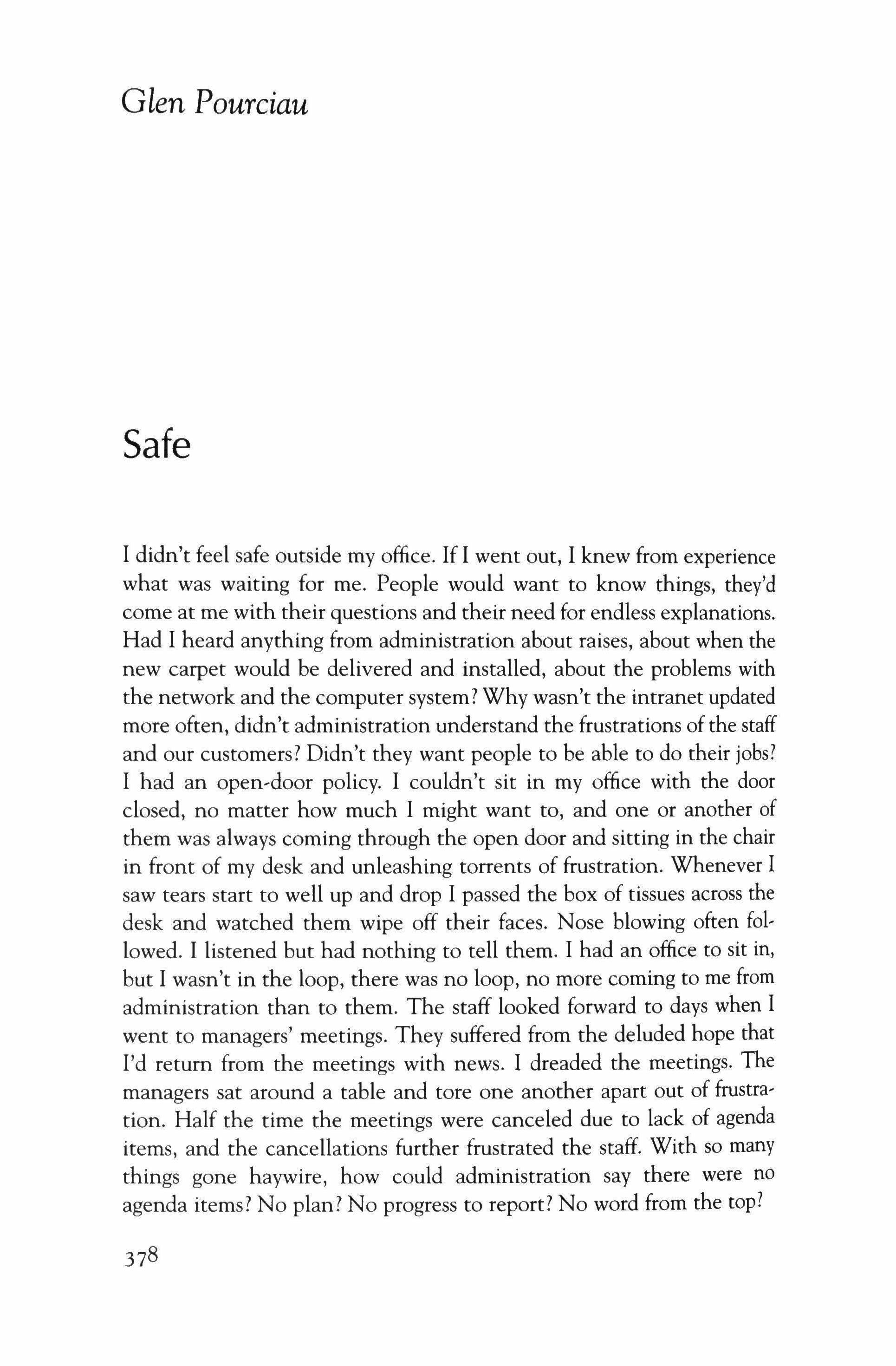
Safe
I didn't feel safe outside my office. If I went out, I knew from experience what was waiting for me. People would want to know things, they'd come at me with their questions and their need for endless explanations. Had I heard anything from administration about raises, about when the new carpet would be delivered and installed, about the problems with the network and the computer system? Why wasn't the intranet updated more often, didn't administration understand the frustrations of the staff and our customers? Didn't they want people to be able to do their jobs? I had an open-door policy. I couldn't sit in my office with the door closed, no matter how much I might want to, and one or another of them was always coming through the open door and sitting in the chair in front of my desk and unleashing torrents of frustration. Whenever I saw tears start to well up and drop I passed the box of tissues across the desk and watched them wipe off their faces. Nose blowing often followed. I listened but had nothing to tell them. I had an office to sit in, but I wasn't in the loop, there was no loop, no more coming to me from administration than to them. The staff looked forward to days when I went to managers' meetings. They suffered from the deluded hope that I'd return from the meetings with news. I dreaded the meetings. The managers sat around a table and tore one another apart out of frustration. Half the time the meetings were canceled due to lack of agenda items, and the cancellations further frustrated the staff. With so many things gone haywire, how could administration say there were no agenda items? No plan? No progress to report? No word from the top?
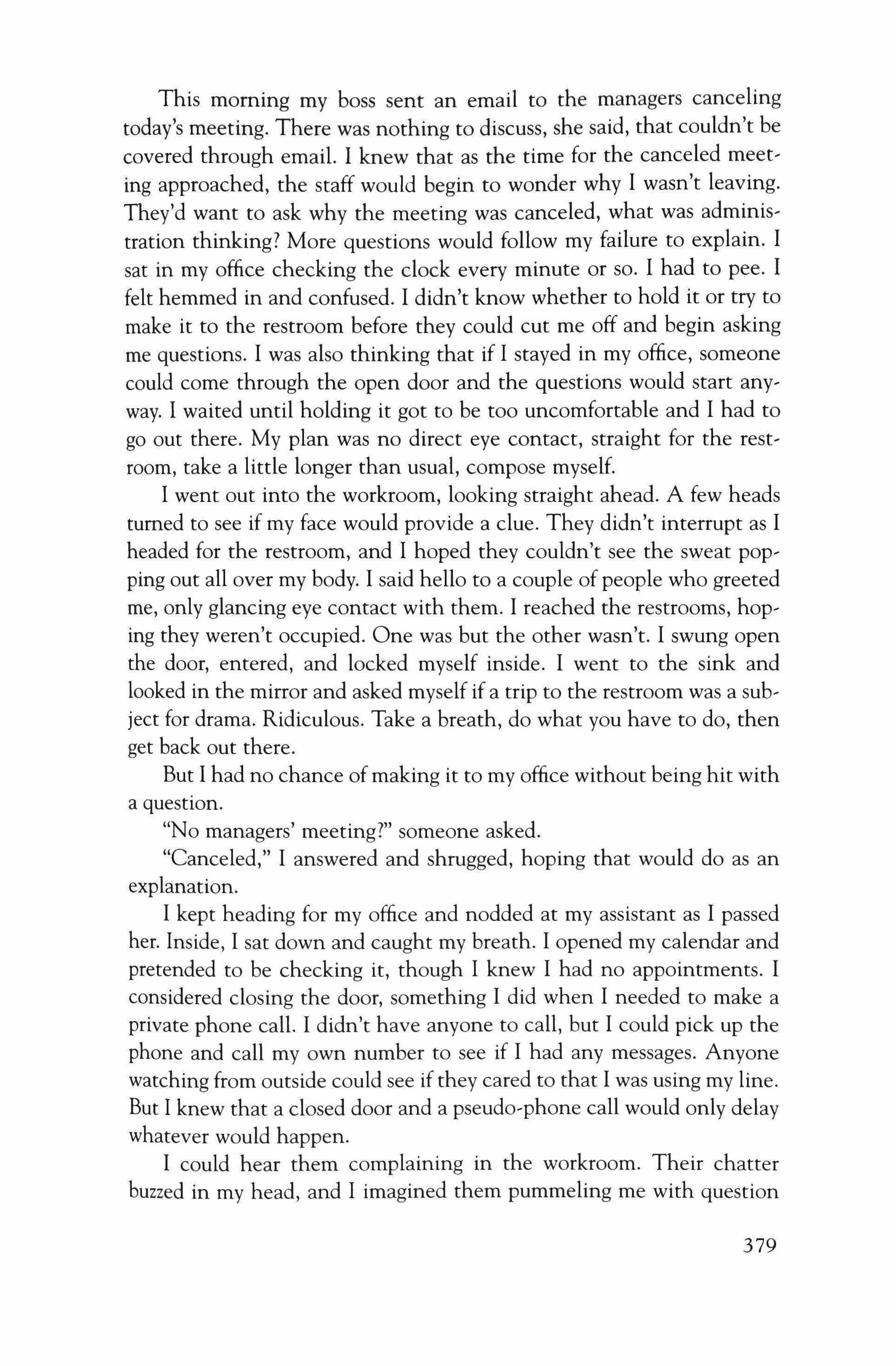
This morning my boss sent an email to the managers canceling today's meeting. There was nothing to discuss, she said, that couldn't be covered through email. I knew that as the time for the canceled meeting approached, the staff would begin to wonder why I wasn't leaving. They'd want to ask why the meeting was canceled, what was administration thinking? More questions would follow my failure to explain. I sat in my office checking the clock every minute or so. I had to pee. I felt hemmed in and confused. I didn't know whether to hold it or try to make it to the restroom before they could cut me off and begin asking me questions. I was also thinking that if I stayed in my office, someone could come through the open door and the questions would start anyway. I waited until holding it got to be too uncomfortable and I had to go out there. My plan was no direct eye contact, straight for the restroom, take a little longer than usual, compose myself.
I went out into the workroom, looking straight ahead. A few heads turned to see if my face would provide a clue. They didn't interrupt as I headed for the restroom, and I hoped they couldn't see the sweat popping out all over my body. I said hello to a couple of people who greeted me, only glancing eye contact with them. I reached the restrooms, hoping they weren't occupied. One was but the other wasn't. I swung open the door, entered, and locked myself inside. I went to the sink and looked in the mirror and asked myself if a trip to the restroom was a subject for drama. Ridiculous. Take a breath, do what you have to do, then get back out there.
But I had no chance ofmaking it to my office without being hit with a question.
"No managers' meeting?" someone asked.
"Canceled," I answered and shrugged, hoping that would do as an explanation.
I kept heading for my office and nodded at my assistant as I passed her. Inside, I sat down and caught my breath. I opened my calendar and pretended to be checking it, though I knew I had no appointments. I considered closing the door, something I did when I needed to make a private phone call. I didn't have anyone to call, but I could pick up the phone and call my own number to see if I had any messages. Anyone watching from outside could see if they cared to that I was using my line. But I knew that a closed door and a pseudo-phone call would only delay whatever would happen.
I could hear them complaining in the workroom. Their chatter buzzed in my head, and I imagined them pummeling me with question
379
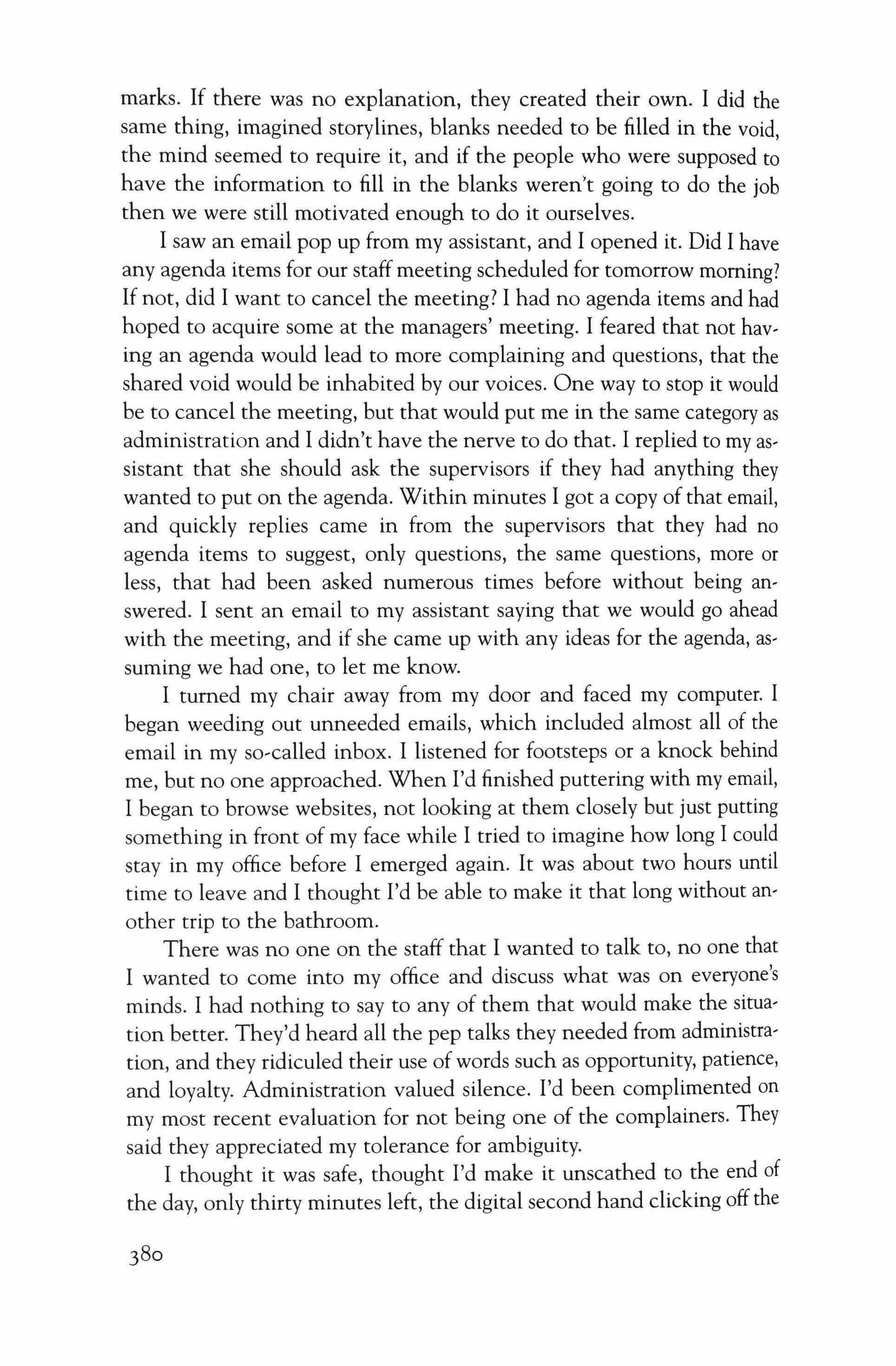
marks. If there was no explanation, they created their own. I did the same thing, imagined storylines, blanks needed to be filled in the void, the mind seemed to require it, and if the people who were supposed to have the information to fill in the blanks weren't going to do the job then we were still motivated enough to do it ourselves.
I saw an email pop up from my assistant, and I opened it. Did I have any agenda items for our staff meeting scheduled for tomorrow morning? If not, did I want to cancel the meeting? I had no agenda items and had hoped to acquire some at the managers' meeting. I feared that not having an agenda would lead to more complaining and questions, that the shared void would be inhabited by our voices. One way to stop it would be to cancel the meeting, but that would put me in the same category as administration and I didn't have the nerve to do that. I replied to my assistant that she should ask the supervisors if they had anything they wanted to put on the agenda. Within minutes I got a copy of that email, and quickly replies came in from the supervisors that they had no agenda items to suggest, only questions, the same questions, more or less, that had been asked numerous times before without being answered. I sent an email to my assistant saying that we would go ahead with the meeting, and if she came up with any ideas for the agenda, assuming we had one, to let me know.
I turned my chair away from my door and faced my computer. I began weeding out unneeded emails, which included almost all of the email inmyso-calledinbox.Ilistened for footsteps or a knock behind me, but no one approached. When I'd finished puttering with my email, I began to browse websites, not looking at them closely but just putting something in front of my face while I tried to imagine how long I could stay in my office before I emerged again. It was about two hours until time to leave and I thought I'd be able to make it that long without another trip to the bathroom.
There was no one on the staff that I wanted to talk to, no one that I wanted to come into my office and discuss what was on everyone's minds. I had nothing to say to any of them that would make the situation better. They'd heard all the pep talks they needed from administration, and they ridiculed their use of words such as opportunity, patience, and loyalty. Administration valued silence. I'd been complimented on my most recent evaluation for not being one of the complainers. They said they appreciated my tolerance for ambiguity.
I thought it was safe, thought I'd make it unscathed to the end of the day, only thirty minutes left, the digital second hand clicking off the
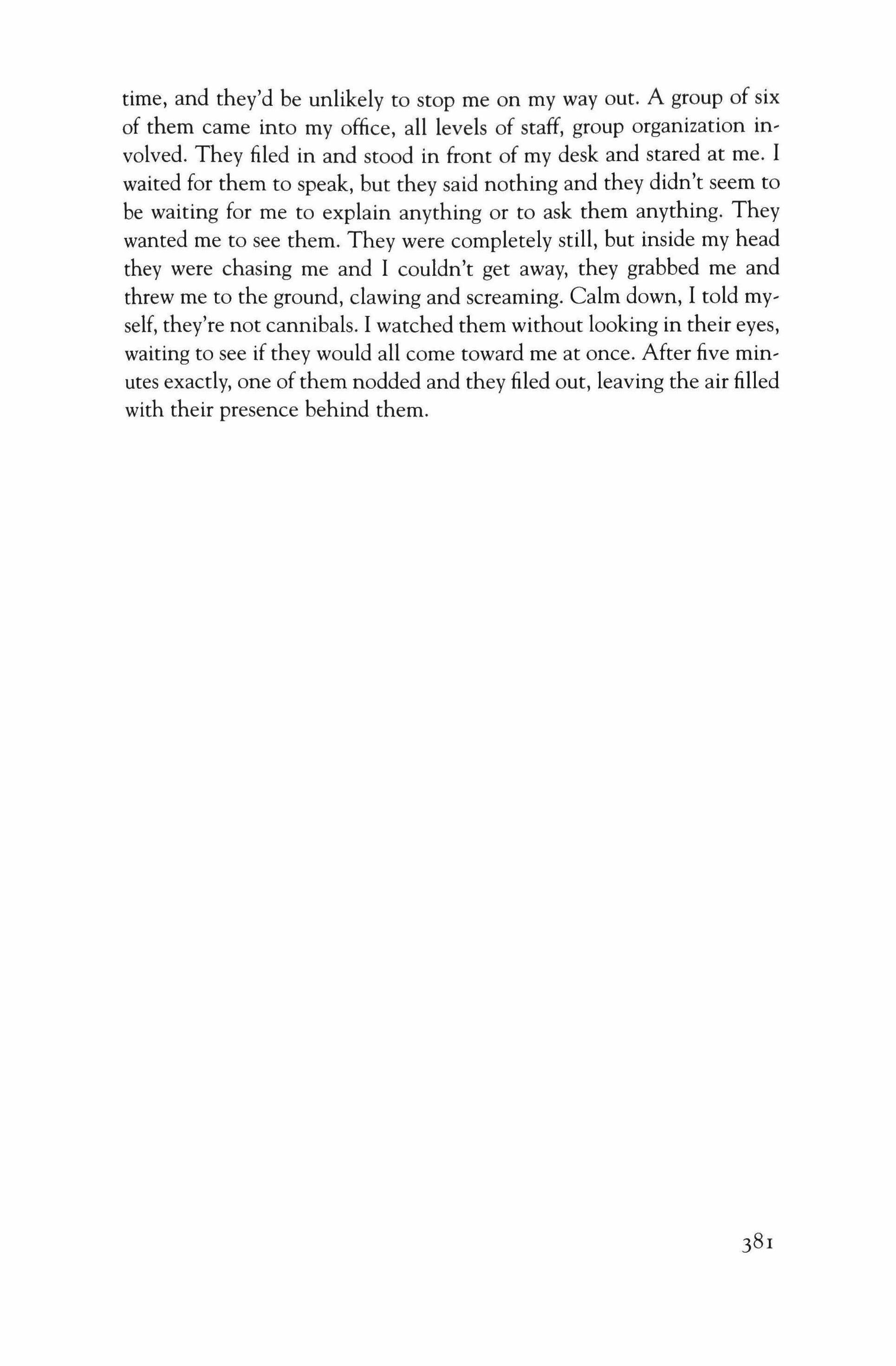
time, and they'd be unlikely to stop me on my way out. A group of six of them came into my office, all levels of staff, group organization involved. They filed in and stood in front of my desk and stared at me. I waited for them to speak, but they said nothing and they didn't seem to be waiting for me to explain anything or to ask them anything. They wanted me to see them. They were completely still, but inside my head they were chasing me and I couldn't get away, they grabbed me and threw me to the ground, clawing and screaming. Calm down, I told myself, they're not cannibals. I watched them without looking in their eyes, waiting to see if they would all come toward me at once. After five minutes exactly, one of them nodded and they filed out, leaving the air filled with their presence behind them.
Michael Kahre
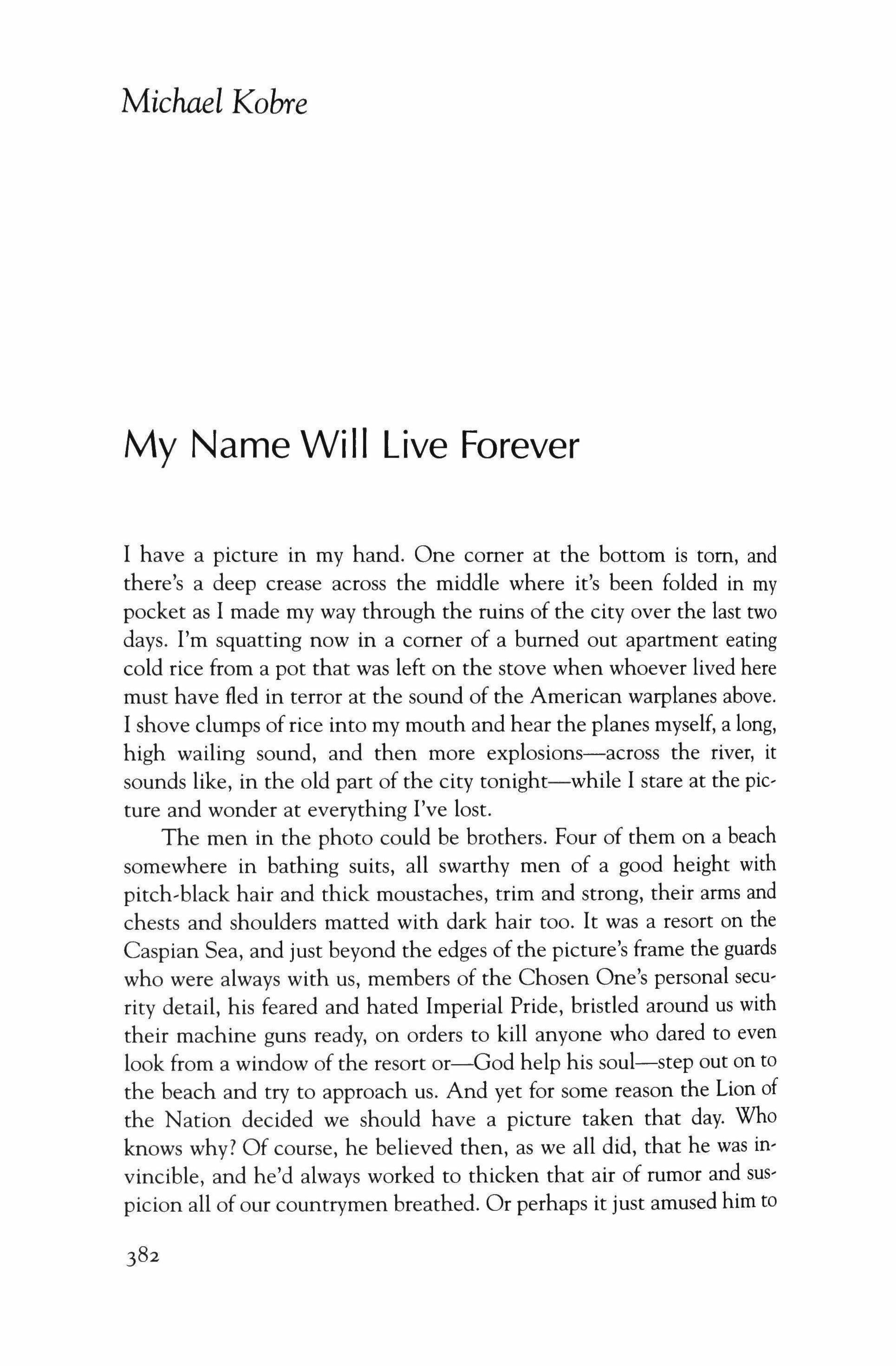
My Name Will Live Forever
I have a picture in my hand. One comer at the bottom is tom, and there's a deep crease across the middle where it's been folded in my pocket as I made my way through the ruins of the city over the last two days. I'm squatting now in a comer of a burned out apartment eating cold rice from a pot that was left on the stove when whoever lived here must have fled in terror at the sound of the American warplanes above. I shove clumps of rice into my mouth and hear the planes myself, a long, high wailing sound, and then more explosions-across the river, it sounds like, in the old part of the city tonight-while I stare at the picture and wonder at everything I've lost.
The men in the photo could be brothers. Four of them on a beach somewhere in bathing suits, all swarthy men of a good height with pitch-black hair and thick moustaches, trim and strong, their arms and chests and shoulders matted with dark hair too. It was a resort on the Caspian Sea, and just beyond the edges of the picture's frame the guards who were always with us, members of the Chosen One's personal security detail, his feared and hated Imperial Pride, bristled around us with their machine guns ready, on orders to kill anyone who dared to even look from a window of the resort or-God help his soul-step out on to the beach and try to approach us. And yet for some reason the Lion of the Nation decided we should have a picture taken that day. Who knows why? Of course, he believed then, as we all did, that he was invincible, and he'd always worked to thicken that air of rumor and suspicion all of our countrymen breathed. Or perhaps it just amused him to
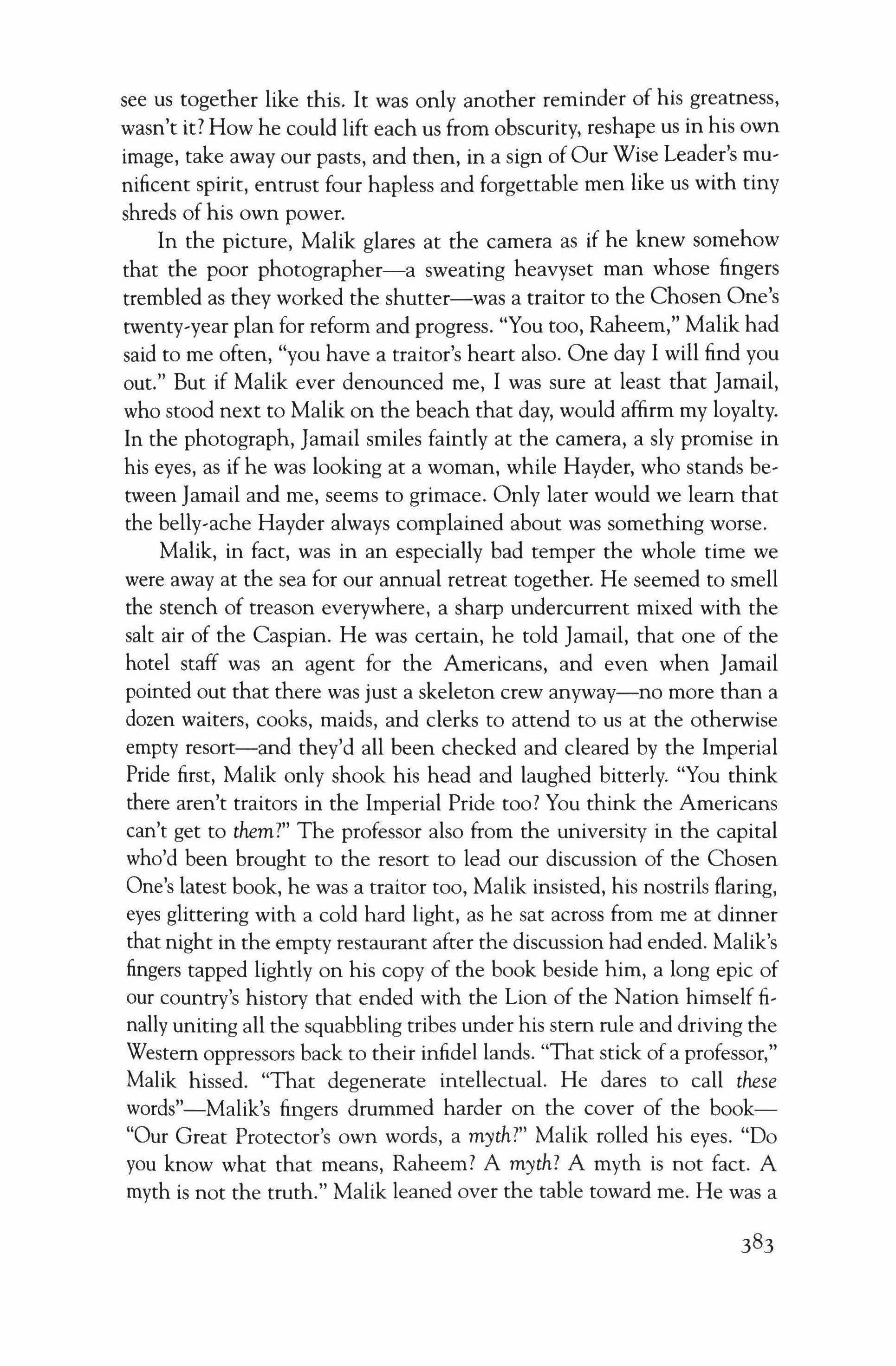
see us together like this. It was only another reminder of his greatness, wasn't it? How he could lift each us from obscurity, reshape us in his own image, take away our pasts, and then, in a sign of Our Wise Leader's mu� nificent spirit, entrust four hapless and forgettable men like us with tiny shreds of his own power.
In the picture, Malik glares at the camera as if he knew somehow that the poor photographer-a sweating heavyset man whose fingers trembled as they worked the shutter-was a traitor to the Chosen One's twenty-year plan for reform and progress. "You too, Raheem," Malik had said to me often, "you have a traitor's heart also. One day I will find you out." But if Malik ever denounced me, I was sure at least that Jamail, who stood next to Malik on the beach that day, would affirm my loyalty. In the photograph, Jamail smiles faintly at the camera, a sly promise in his eyes, as if he was looking at a woman, while Hayder, who stands between Jamail and me, seems to grimace. Only later would we learn that the belly-ache Hayder always complained about was something worse.
Malik, in fact, was in an especially bad temper the whole time we were away at the sea for our annual retreat together. He seemed to smell the stench of treason everywhere, a sharp undercurrent mixed with the salt air of the Caspian. He was certain, he told jamail, that one of the hotel staff was an agent for the Americans, and even when Jamail pointed out that there was just a skeleton crew anyway-no more than a dozen waiters, cooks, maids, and clerks to attend to us at the otherwise empty resort-and they'd all been checked and cleared by the Imperial Pride first, Malik only shook his head and laughed bitterly. "You think there aren't traitors in the Imperial Pride too? You think the Americans can't get to them?" The professor also from the university in the capital who'd been brought to the resort to lead our discussion of the Chosen One's latest book, he was a traitor too, Malik insisted, his nostrils flaring, eyes glittering with a cold hard light, as he sat across from me at dinner that night in the empty restaurant after the discussion had ended. Malik's fingers tapped lightly on his copy of the book beside him, a long epic of our country's history that ended with the Lion of the Nation himself finally uniting all the squabbling tribes under his stem rule and driving the Western oppressors back to their infidel lands. "That stick of a professor," Malik hissed. "That degenerate intellectual. He dares to call these words"-Malik's fingers drummed harder on the cover of the book"Our Great Protector's own words, a myth?" Malik rolled his eyes. "Do you know what that means, Raheem? A myth? A myth is not fact. A myth is not the truth." Malik leaned over the table toward me. He was a
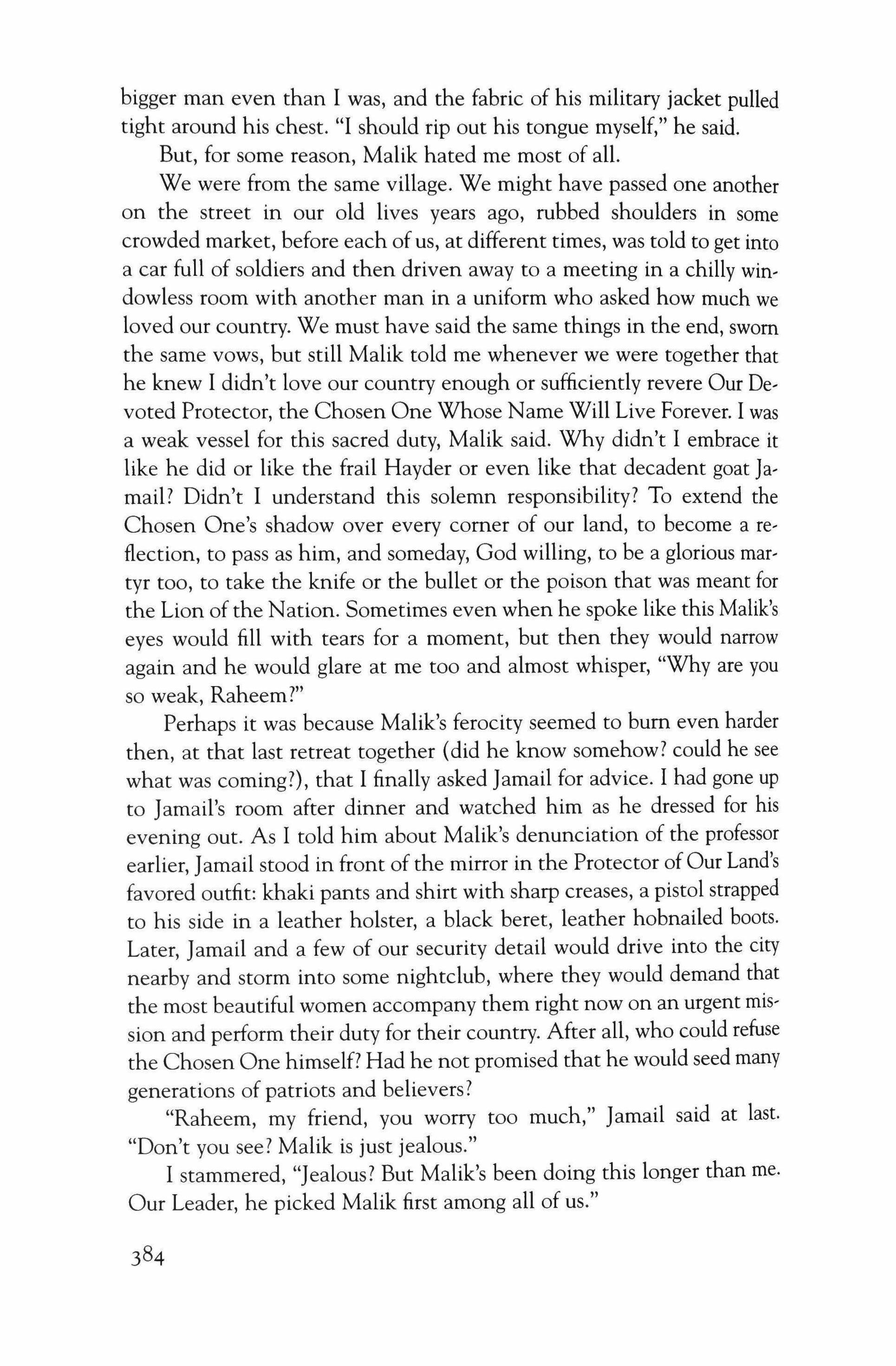
bigger man even than I was, and the fabric of his military jacket pulled tight around his chest. "I should rip out his tongue myself," he said.
But, for some reason, Malik hated me most of all.
We were from the same village. We might have passed one another on the street in our old lives years ago, rubbed shoulders in some crowded market, before each of us, at different times, was told to get into a car full of soldiers and then driven away to a meeting in a chilly windowless room with another man in a uniform who asked how much we loved our country. We must have said the same things in the end, sworn the same vows, but still Malik told me whenever we were together that he knew I didn't love our country enough or sufficiently revere Our Devoted Protector, the Chosen One Whose Name Will Live Forever. I was a weak vessel for this sacred duty, Malik said. Why didn't I embrace it like he did or like the frail Hayder or even like that decadent goat [amail? Didn't I understand this solemn responsibility? To extend the Chosen One's shadow over every comer of our land, to become a reflection, to pass as him, and someday, God willing, to be a glorious martyr too, to take the knife or the bullet or the poison that was meant for the Lion of the Nation. Sometimes even when he spoke like this Malik's eyes would fill with tears for a moment, but then they would narrow again and he would glare at me too and almost whisper, "Why are you so weak, Raheem?"
Perhaps it was because Malik's ferocity seemed to burn even harder then, at that last retreat together (did he know somehow? could he see what was coming?), that I finally asked ]amail for advice. I had gone up to ]amail's room after dinner and watched him as he dressed for his evening out. As I told him about Malik's denunciation of the professor earlier, ]amail stood in front of the mirror in the Protector ofOur Land's favored outfit: khaki pants and shirt with sharp creases, a pistol strapped to his side in a leather holster, a black beret, leather hobnailed boots. Later, ]amail and a few of our security detail would drive into the city nearby and storm into some nightclub, where they would demand that the most beautiful women accompany them right now on an urgent mission and perform their duty for their country. After all, who could refuse the Chosen One himself? Had he not promised that he would seed many generations of patriots and believers?
"Raheem, my friend, you worry too much," ]amail said at last. "Don't you see? Malik is just jealous." I stammered, "]ealous? But Malik's been doing this longer than me. Our Leader, he picked Malik first among all of us."
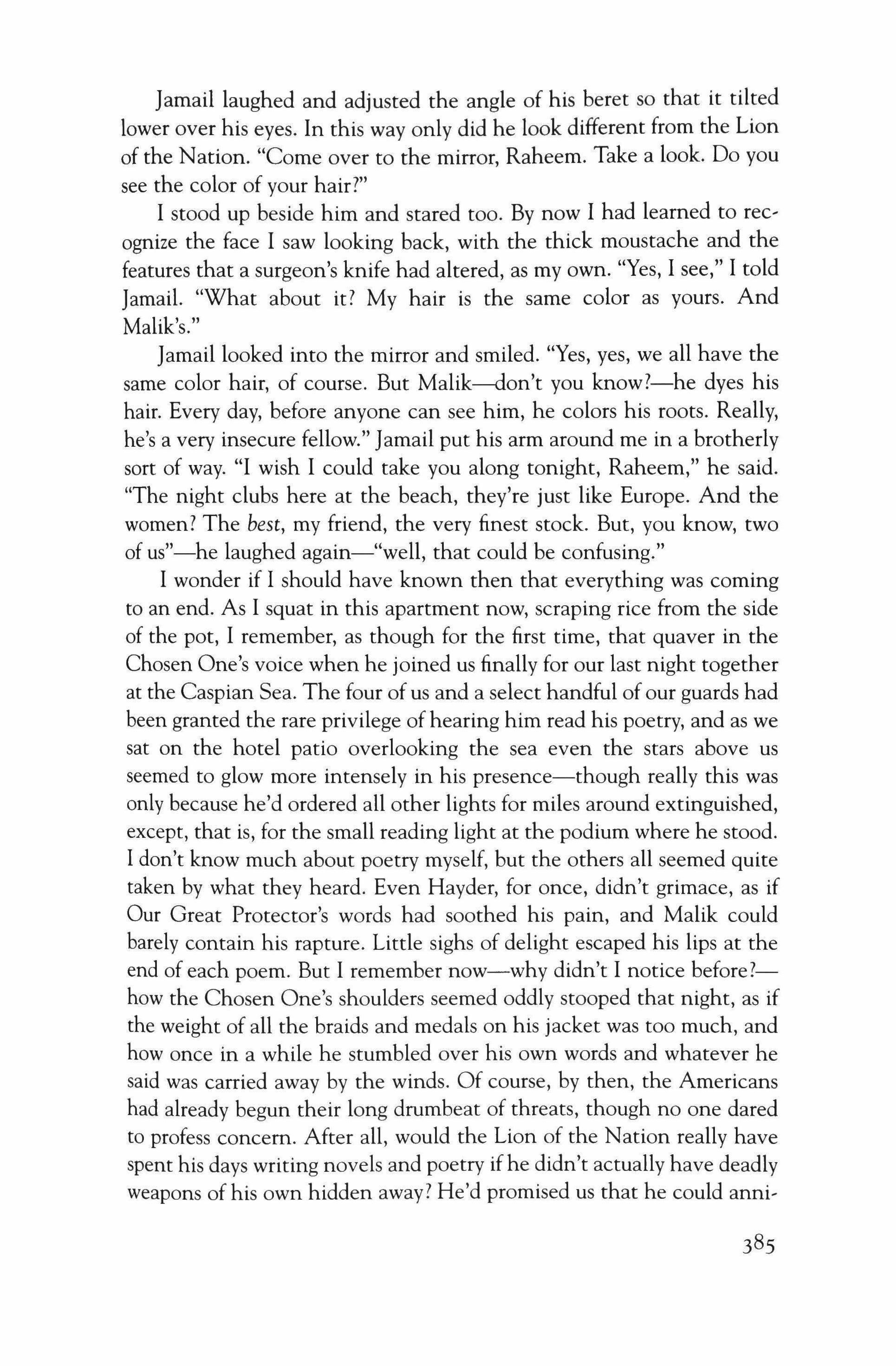
Jamaillaughed and adjusted the angle of his beret so that it tilted lower over his eyes. In this way only did he look different from the Lion of the Nation. "Come over to the mirror, Raheem. Take a look. Do you see the color of your hair?"
I stood up beside him and stared too. By now I had learned to recognize the face I saw looking back, with the thick moustache and the features that a surgeon's knife had altered, as my own. "Yes, I see," I told Jamail. "What about it? My hair is the same color as yours. And Malik's."
Jamaillooked into the mirror and smiled. "Yes, yes, we all have the same color hair, of course. But Malik-don't you know?-he dyes his hair. Every day, before anyone can see him, he colors his roots. Really, he's a very insecure fellow." Jamail put his arm around me in a brotherly sort of way. "I wish I could take you along tonight, Raheem," he said. "The night clubs here at the beach, they're just like Europe. And the women? The best, my friend, the very finest stock. But, you know, two of us"-he laughed again-"well, that could be confusing."
I wonder if I should have known then that everything was coming to an end. As I squat in this apartment now, scraping rice from the side of the pot, I remember, as though for the first time, that quaver in the Chosen One's voice when he joined us finally for our last night together at the Caspian Sea. The four of us and a select handful of our guards had been granted the rare privilege of hearing him read his poetry, and as we sat on the hotel patio overlooking the sea even the stars above us seemed to glow more intensely in his presence-though really this was only because he'd ordered all other lights for miles around extinguished, except, that is, for the small reading light at the podium where he stood. I don't know much about poetry myself, but the others all seemed quite taken by what they heard. Even Hayder, for once, didn't grimace, as if Our Great Protector's words had soothed his pain, and Malik could barely contain his rapture. Little sighs of delight escaped his lips at the end of each poem. But I remember now-why didn't I notice before?how the Chosen One's shoulders seemed oddly stooped that night, as if the weight of all the braids and medals on his jacket was too much, and how once in a while he stumbled over his own words and whatever he said was carried away by the winds. Of course, by then, the Americans had already begun their long drumbeat of threats, though no one dared to profess concern. After all, would the Lion of the Nation really have spent his days writing novels and poetry ifhe didn't actually have deadly weapons of his own hidden away? He'd promised us that he could anni-
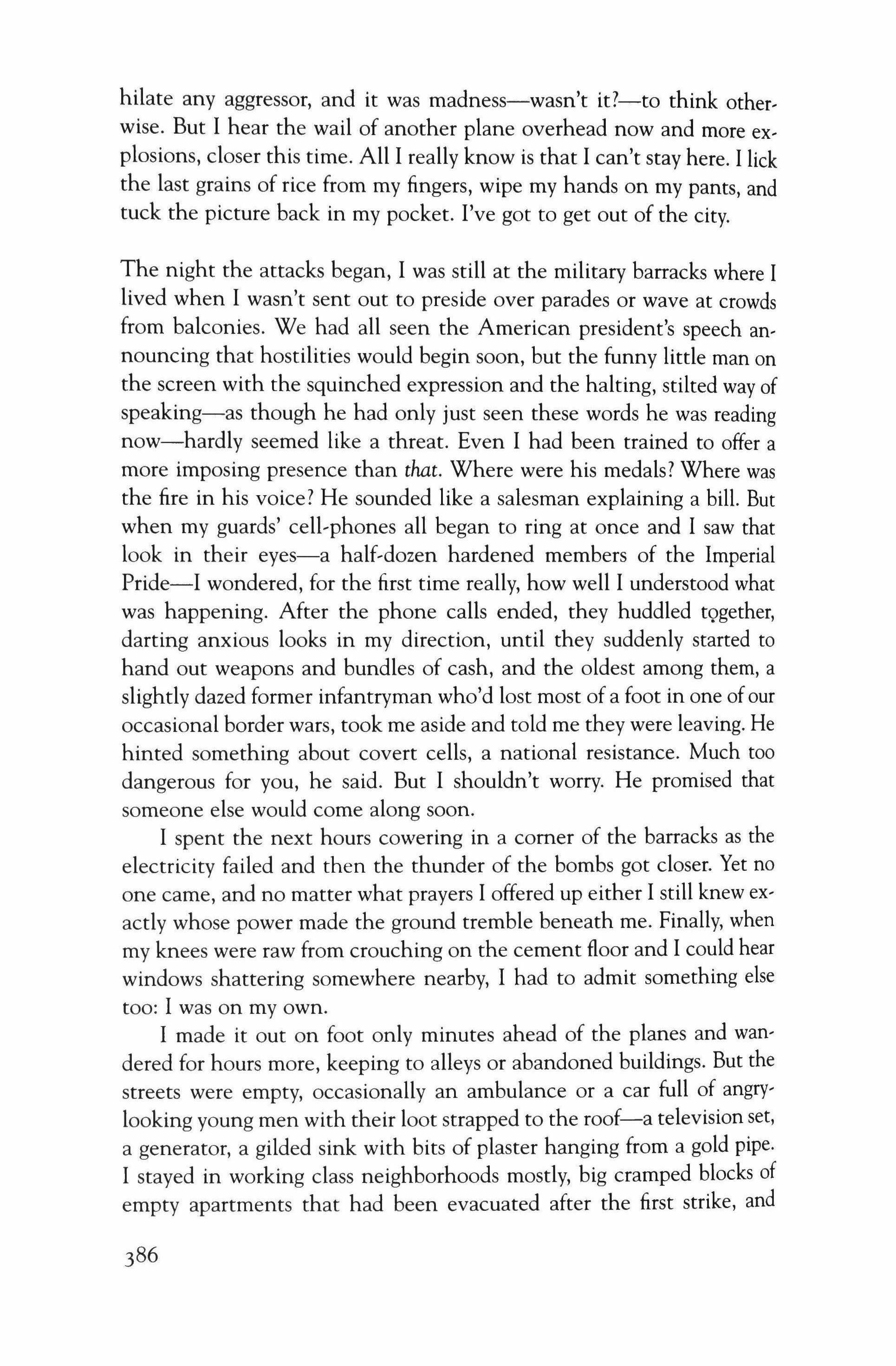
hilate any aggressor, and it was madness-wasn't it?-to think otherwise. But I hear the wail of another plane overhead now and more explosions, closer this time. All I really know is that I can't stay here. I lick the last grains of rice from my fingers, wipe my hands on my pants, and tuck the picture back in my pocket. I've got to get out of the city.
The night the attacks began, I was still at the military barracks where I lived when I wasn't sent out to preside over parades or wave at crowds from balconies. We had all seen the American president's speech announcing that hostilities would begin soon, but the funny little man on the screen with the squinched expression and the halting, stilted way of speaking-as though he had only just seen these words he was reading now-hardly seemed like a threat. Even I had been trained to offer a more imposing presence than that. Where were his medals? Where was the fire in his voice? He sounded like a salesman explaining a bill. But when my guards' cell-phones all began to ring at once and I saw that look in their eyes-a half-dozen hardened members of the Imperial Pride-I wondered, for the first time really, how well I understood what was happening. After the phone calls ended, they huddled together, darting anxious looks in my direction, until they suddenly started to hand out weapons and bundles of cash, and the oldest among them, a slightly dazed former infantryman who'd lost most of a foot in one of our occasional border wars, took me aside and told me they were leaving. He hinted something about covert cells, a national resistance. Much too dangerous for you, he said. But I shouldn't worry. He promised that someone else would come along soon.
I spent the next hours cowering in a corner of the barracks as the electricity failed and then the thunder of the bombs got closer. Yet no one came, and no matter what prayers I offered up either I still knew exactly whose power made the ground tremble beneath me. Finally, when my knees were raw from crouching on the cement floor and I could hear windows shattering somewhere nearby, I had to admit something else too: I was on my own.
I made it out on foot only minutes ahead of the planes and wandered for hours more, keeping to alleys or abandoned buildings. But the streets were empty, occasionally an ambulance or a car full of angrylooking young men with their loot strapped to the roof-a television set, a generator, a gilded sink with bits of plaster hanging from a gold pipe. I stayed in working class neighborhoods mostly, big cramped blocks of empty apartments that had been evacuated after the first strike, and
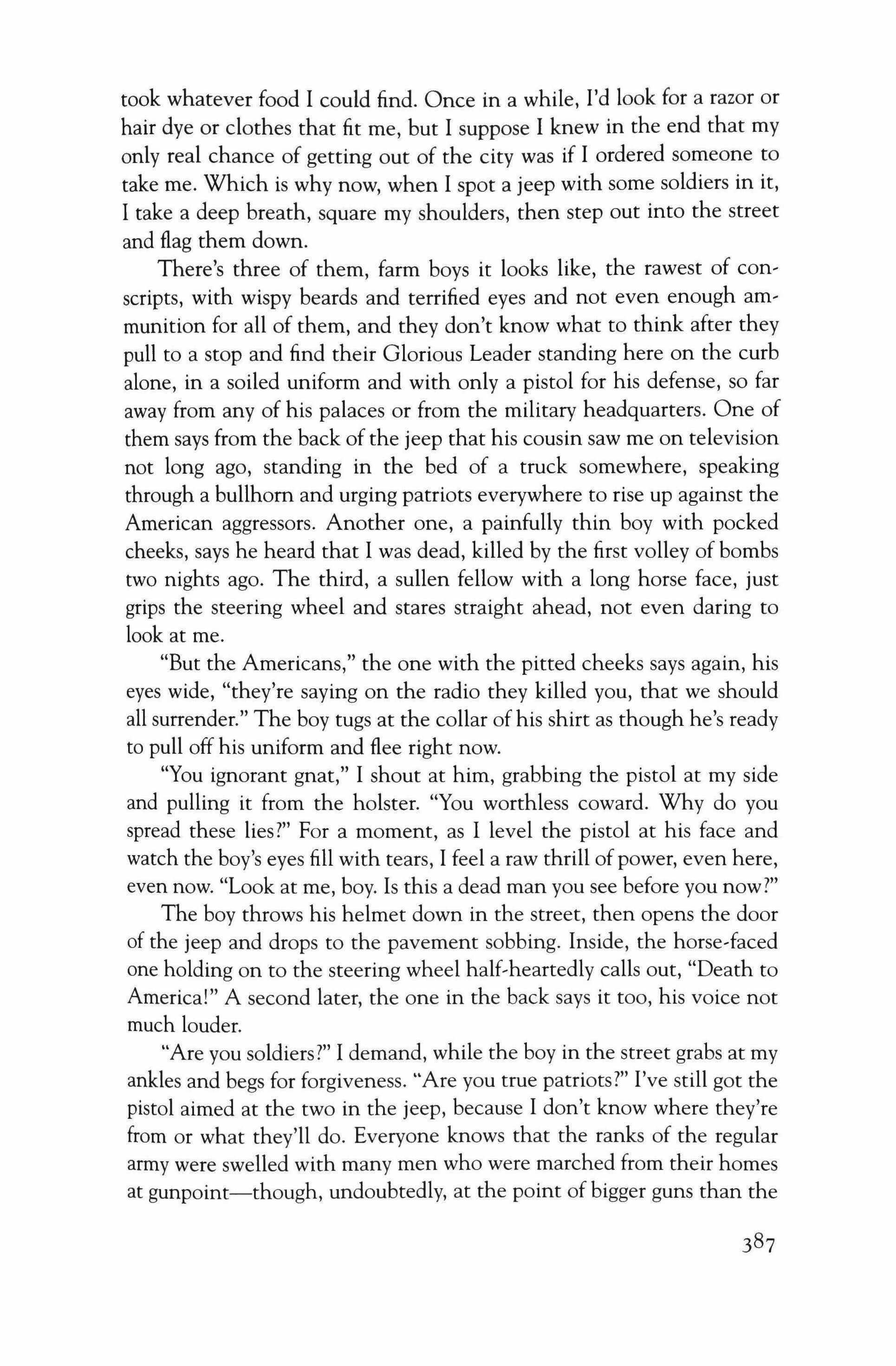
took whatever food I could find. Once in a while, I'd look for a razor or hair dye or clothes that fit me, but I suppose I knew in the end that my only real chance of getting out of the city was if I ordered someone to take me. Which is why now, when I spot a jeep with some soldiers in it, I take a deep breath, square my shoulders, then step out into the street and flag them down.
There's three of them, farm boys it looks like, the rawest of conscripts, with wispy beards and terrified eyes and not even enough ammunition for all of them, and they don't know what to think after they pull to a stop and find their Glorious Leader standing here on the curb alone, in a soiled uniform and with only a pistol for his defense, so far away from any of his palaces or from the military headquarters. One of them says from the back of the jeep that his cousin saw me on television not long ago, standing in the bed of a truck somewhere, speaking through a bullhorn and urging patriots everywhere to rise up against the American aggressors. Another one, a painfully thin boy with pocked cheeks, says he heard that I was dead, killed by the first volley of bombs two nights ago. The third, a sullen fellow with a long horse face, just grips the steering wheel and stares straight ahead, not even daring to look at me.
"But the Americans," the one with the pitted cheeks says again, his eyes wide, "they're saying on the radio they killed you, that we should all surrender." The boy tugs at the collar of his shirt as though he's ready to pull off his uniform and flee right now.
"You ignorant gnat," I shout at him, grabbing the pistol at my side and pulling it from the holster. "You worthless coward. Why do you spread these lies?" For a moment, as I level the pistol at his face and watch the boy's eyes fill with tears, I feel a raw thrill of power, even here, even now. "Look at me, boy. Is this a dead man you see before you now?"
The boy throws his helmet down in the street, then opens the door of the jeep and drops to the pavement sobbing. Inside, the horse-faced one holding on to the steering wheel half-heartedly calls out, "Death to America!" A second later, the one in the back says it too, his voice not much louder.
"Are you soldiers?" I demand, while the boy in the street grabs at my ankles and begs for forgiveness. "Are you true patriots?" I've still got the pistol aimed at the two in the jeep, because I don't know where they're from or what they'll do. Everyone knows that the ranks of the regular army were swelled with many men who were marched from their homes at gunpoint-though, undoubtedly, at the point of bigger guns than the
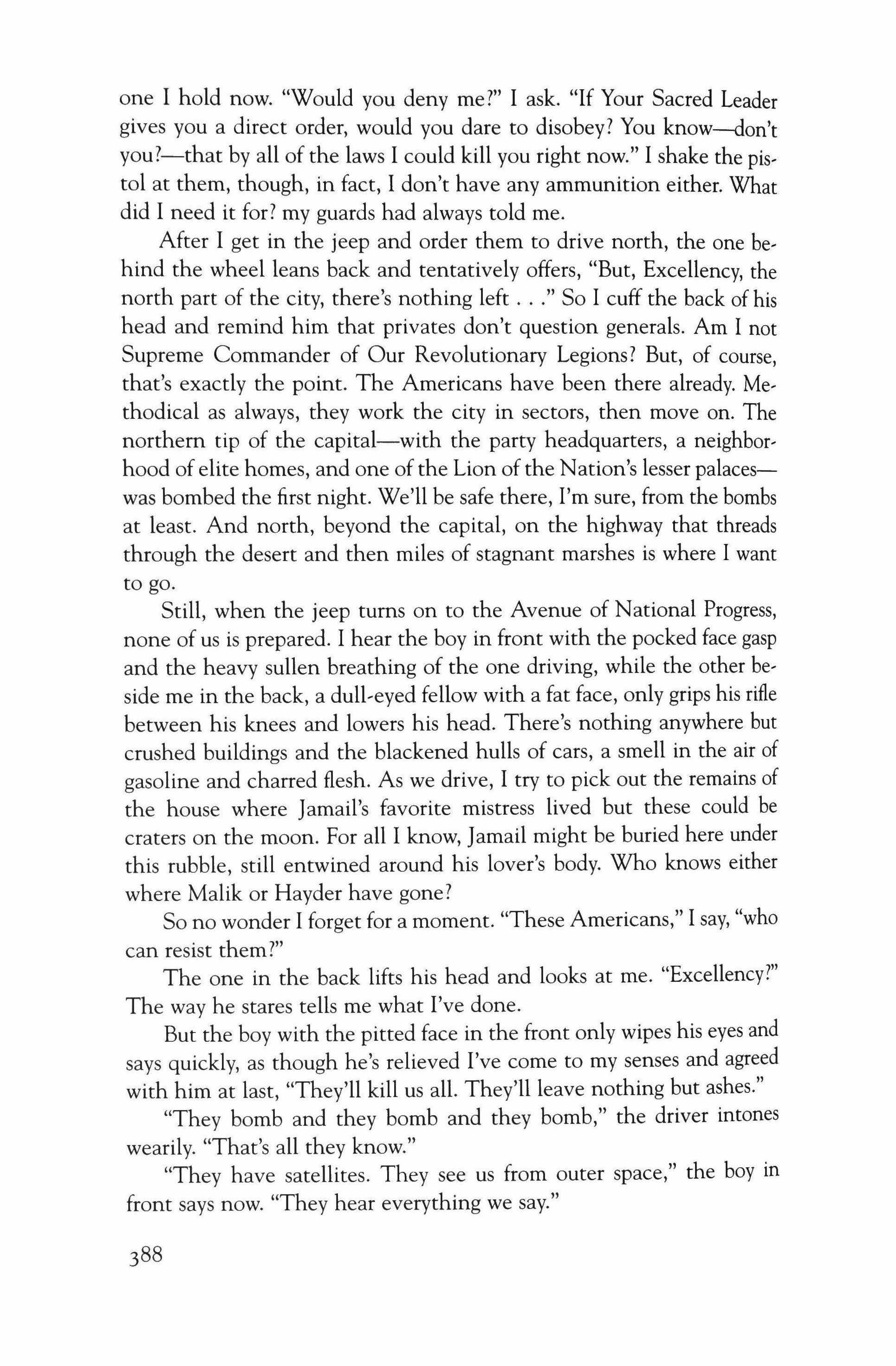
one I hold now. "Would you deny me?" I ask. "If Your Sacred Leader gives you a direct order, would you dare to disobey? You know--don't you?-that by all of the laws I could kill you right now." I shake the pistol at them, though, in fact, I don't have any ammunition either. What did I need it for? my guards had always told me.
After I get in the jeep and order them to drive north, the one behind the wheel leans back and tentatively offers, "But, Excellency, the north part of the city, there's nothing left So I cuff the back of his head and remind him that privates don't question generals. Am I not Supreme Commander of Our Revolutionary Legions? But, of course, that's exactly the point. The Americans have been there already. Methodical as always, they work the city in sectors, then move on. The northern tip of the capital-with the party headquarters, a neighborhood of elite homes, and one of the Lion of the Nation's lesser palaceswas bombed the first night. We'll be safe there, I'm sure, from the bombs at least. And north, beyond the capital, on the highway that threads through the desert and then miles of stagnant marshes is where I want to go.
Still, when the jeep turns on to the Avenue of National Progress, none of us is prepared. I hear the boy in front with the pocked face gasp and the heavy sullen breathing of the one driving, while the other beside me in the back, a dull-eyed fellow with a fat face, only grips his rifle between his knees and lowers his head. There's nothing anywhere but crushed buildings and the blackened hulls of cars, a smell in the air of gasoline and charred flesh. As we drive, I try to pick out the remains of the house where Jamail's favorite mistress lived but these could be craters on the moon. For all I know, Jamail might be buried here under this rubble, still entwined around his lover's body. Who knows either where Malik or Hayder have gone?
So no wonder I forget for a moment. "These Americans," I say, "who can resist them?"
The one in the back lifts his head and looks at me. "Excellency?" The way he stares tells me what I've done.
But the boy with the pitted face in the front only wipes his eyes and says quickly, as though he's relieved I've come to my senses and agreed with him at last, "They'll kill us all. They'll leave nothing but ashes."
"They bomb and they bomb and they bomb," the driver intones wearily. "That's all they know."
"They have satellites. They see us from outer space," the boy in front says now. "They hear everything we say."
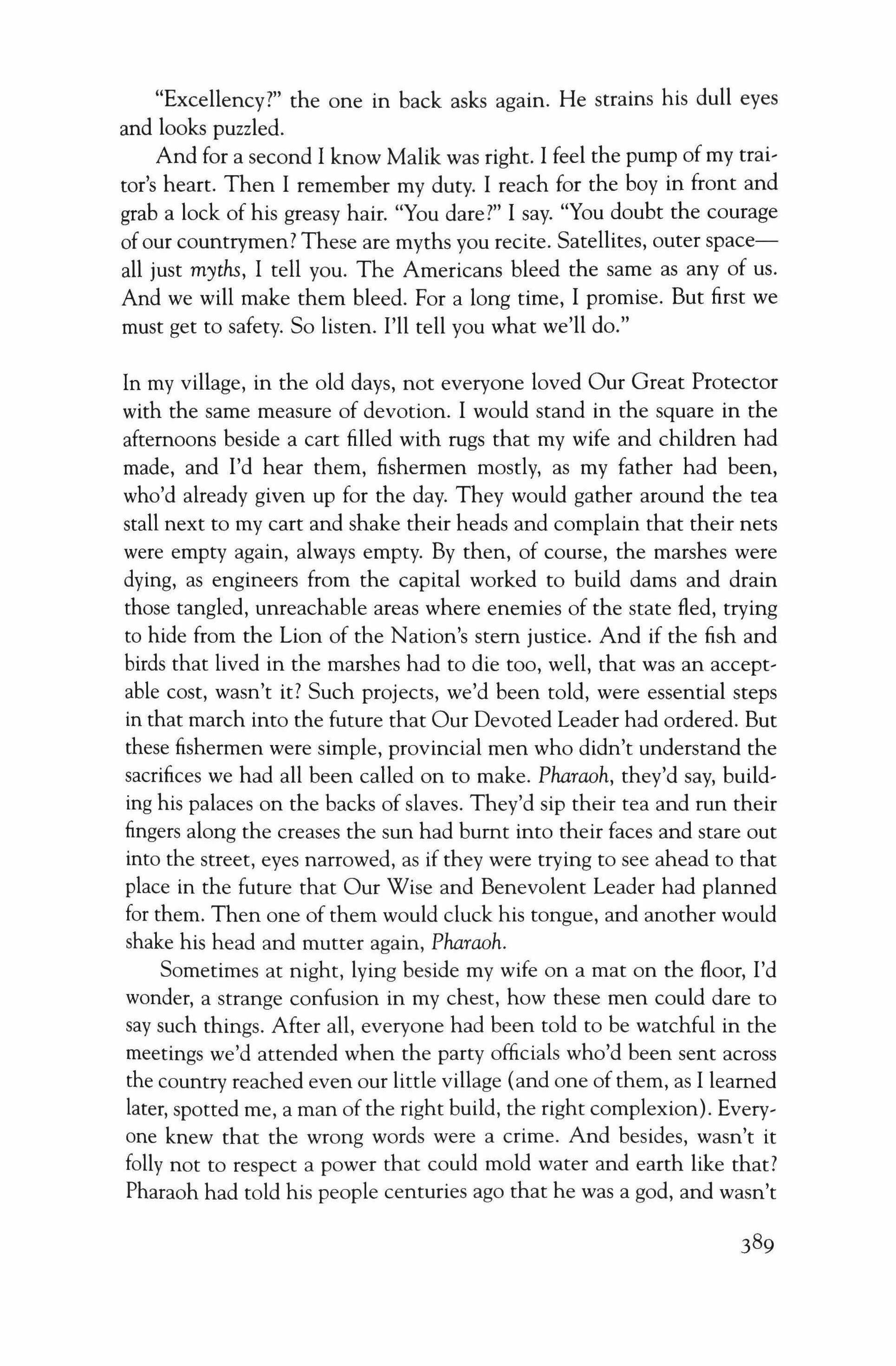
"Excellency?" the one in back asks again. He strains his dull eyes and looks puzzled.
And for a second I know Malik was right. I feel the pump of my traitor's heart. Then I remember my duty. I reach for the boy in front and grab a lock of his greasy hair. "You dare?" I say. "You doubt the courage of our countrymen? These are myths you recite. Satellites, outer spaceall just myths, I tell you. The Americans bleed the same as any of us. And we will make them bleed. For a long time, I promise. But first we must get to safety. So listen. I'll tell you what we'll do."
In my village, in the old days, not everyone loved Our Great Protector with the same measure of devotion. I would stand in the square in the afternoons beside a cart filled with rugs that my wife and children had made, and I'd hear them, fishermen mostly, as my father had been, who'd already given up for the day. They would gather around the tea stall next to my cart and shake their heads and complain that their nets were empty again, always empty. By then, of course, the marshes were dying, as engineers from the capital worked to build dams and drain those tangled, unreachable areas where enemies of the state fled, trying to hide from the Lion of the Nation's stem justice. And if the fish and birds that lived in the marshes had to die too, well, that was an acceptable cost, wasn't it? Such projects, we'd been told, were essential steps in that march into the future that Our Devoted Leader had ordered. But these fishermen were simple, provincial men who didn't understand the sacrifices we had all been called on to make. Pharaoh, they'd say, building his palaces on the backs of slaves. They'd sip their tea and run their fingers along the creases the sun had burnt into their faces and stare out into the street, eyes narrowed, as if they were trying to see ahead to that place in the future that Our Wise and Benevolent Leader had planned for them. Then one of them would cluck his tongue, and another would shake his head and mutter again, Pharaoh.
Sometimes at night, lying beside my wife on a mat on the floor, I'd wonder, a strange confusion in my chest, how these men could dare to say such things. After all, everyone had been told to be watchful in the meetings we'd attended when the party officials who'd been sent across the country reached even our little village {and one of them, as I learned later, spotted me, a man of the right build, the right complexion}. Everyone knew that the wrong words were a crime. And besides, wasn't it folly not to respect a power that could mold water and earth like that? Pharaoh had told his people centuries ago that he was a god, and wasn't
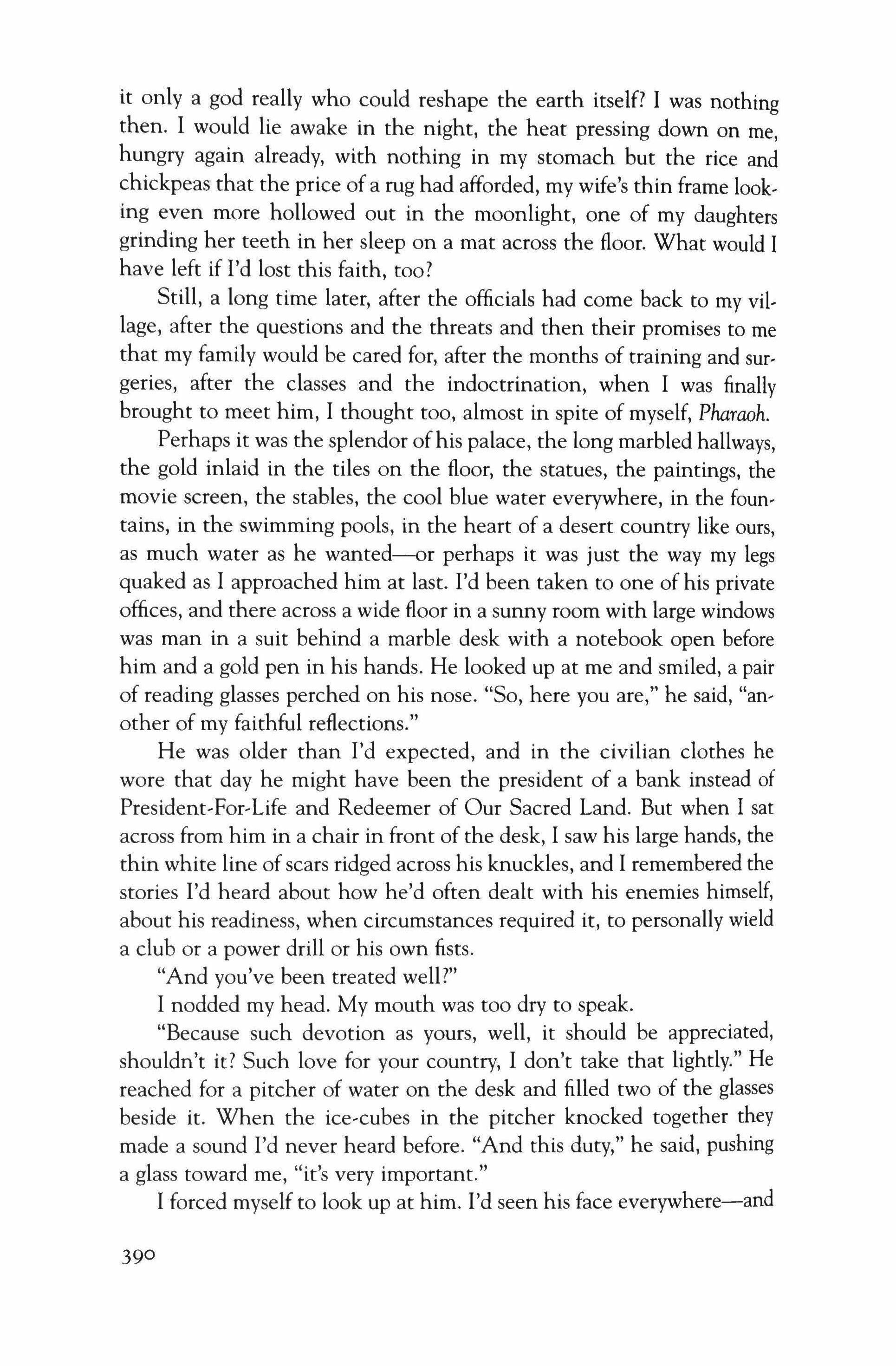
it only a god really who could reshape the earth itself? I was nothing then. I would lie awake in the night, the heat pressing down on me, hungry again already, with nothing in my stomach but the rice and chickpeas that the price of a rug had afforded, my wife's thin frame looking even more hollowed out in the moonlight, one of my daughters grinding her teeth in her sleep on a mat across the floor. What would I have left if I'd lost this faith, too?
Still, a long time later, after the officials had come back to my village, after the questions and the threats and then their promises to me that my family would be cared for, after the months of training and surgeries, after the classes and the indoctrination, when I was finally brought to meet him, I thought too, almost in spite of myself, Pharaoh.
Perhaps it was the splendor ofhis palace, the long marbled hallways, the gold inlaid in the tiles on the floor, the statues, the paintings, the movie screen, the stables, the cool blue water everywhere, in the fountains, in the swimming pools, in the heart of a desert country like ours, as much water as he wanted---or perhaps it was just the way my legs quaked as I approached him at last. I'd been taken to one of his private offices, and there across a wide floor in a sunny room with large windows was man in a suit behind a marble desk with a notebook open before him and a gold pen in his hands. He looked up at me and smiled, a pair of reading glasses perched on his nose. "So, here you are," he said, "another of my faithful reflections."
He was older than I'd expected, and in the civilian clothes he wore that day he might have been the president of a bank instead of President-For-Life and Redeemer of Our Sacred Land. But when I sat across from him in a chair in front of the desk, I saw his large hands, the thin white line of scars ridged across his knuckles, and I remembered the stories I'd heard about how he'd often dealt with his enemies himself, about his readiness, when circumstances required it, to personally wield a club or a power drill or his own fists.
"And you've been treated well?"
I nodded my head. My mouth was too dry to speak.
"Because such devotion as yours, well, it should be appreciated, shouldn't it? Such love for your country, I don't take that lightly." He reached for a pitcher of water on the desk and filled two of the glasses beside it. When the ice-cubes in the pitcher knocked together they made a sound I'd never heard before. "And this duty," he said, pushing a glass toward me, "it's very important."
I forced myself to look up at him. I'd seen his face everywhere-and
390
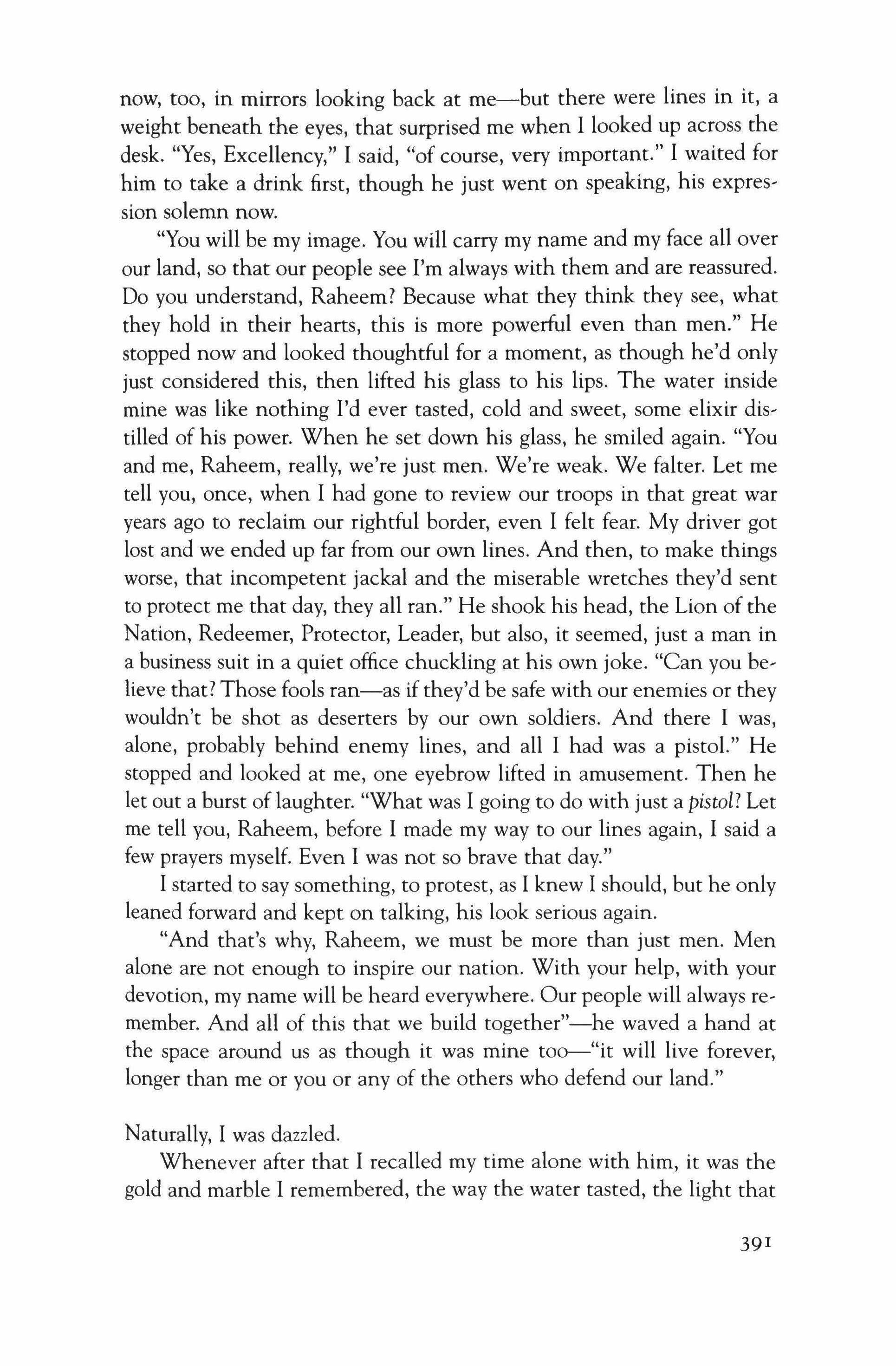
now, too, in mirrors looking back at me-but there were lines in it, a weight beneath the eyes, that surprised me when I looked up across the desk. "Yes, Excellency," I said, "of course, very important." I waited for him to take a drink first, though he just went on speaking, his expression solemn now.
"You will be my image. You will carry my name and my face all over our land, so that our people see I'm always with them and are reassured. Do you understand, Raheem? Because what they think they see, what they hold in their hearts, this is more powerful even than men." He stopped now and looked thoughtful for a moment, as though he'd only just considered this, then lifted his glass to his lips. The water inside mine was like nothing I'd ever tasted, cold and sweet, some elixir distilled of his power. When he set down his glass, he smiled again. "You and me, Raheem, really, we're just men. We're weak. We falter. Let me tell you, once, when I had gone to review our troops in that great war years ago to reclaim our rightful border, even I felt fear. My driver got lost and we ended up far from our own lines. And then, to make things worse, that incompetent jackal and the miserable wretches they'd sent to protect me that day, they all ran." He shook his head, the Lion of the Nation, Redeemer, Protector, Leader, but also, it seemed, just a man in a business suit in a quiet office chuckling at his own joke. "Can you believe that? Those fools ran-as if they'd be safe with our enemies or they wouldn't be shot as deserters by our own soldiers. And there I was, alone, probably behind enemy lines, and all I had was a pistol." He stopped and looked at me, one eyebrow lifted in amusement. Then he let out a burst of laughter. "What was I going to do with just a pistol? Let me tell you, Raheem, before I made my way to our lines again, I said a few prayers myself. Even I was not so brave that day."
I started to say something, to protest, as I knew I should, but he only leaned forward and kept on talking, his look serious again.
"And that's why, Raheem, we must be more than just men. Men alone are not enough to inspire our nation. With your help, with your devotion, my name will be heard everywhere. Our people will always remember. And all of this that we build together"-he waved a hand at the space around us as though it was mine too-"it will live forever, longer than me or you or any of the others who defend our land."
Naturally, I was dazzled.
Whenever after that I recalled my time alone with him, it was the gold and marble I remembered, the way the water tasted, the light that
391
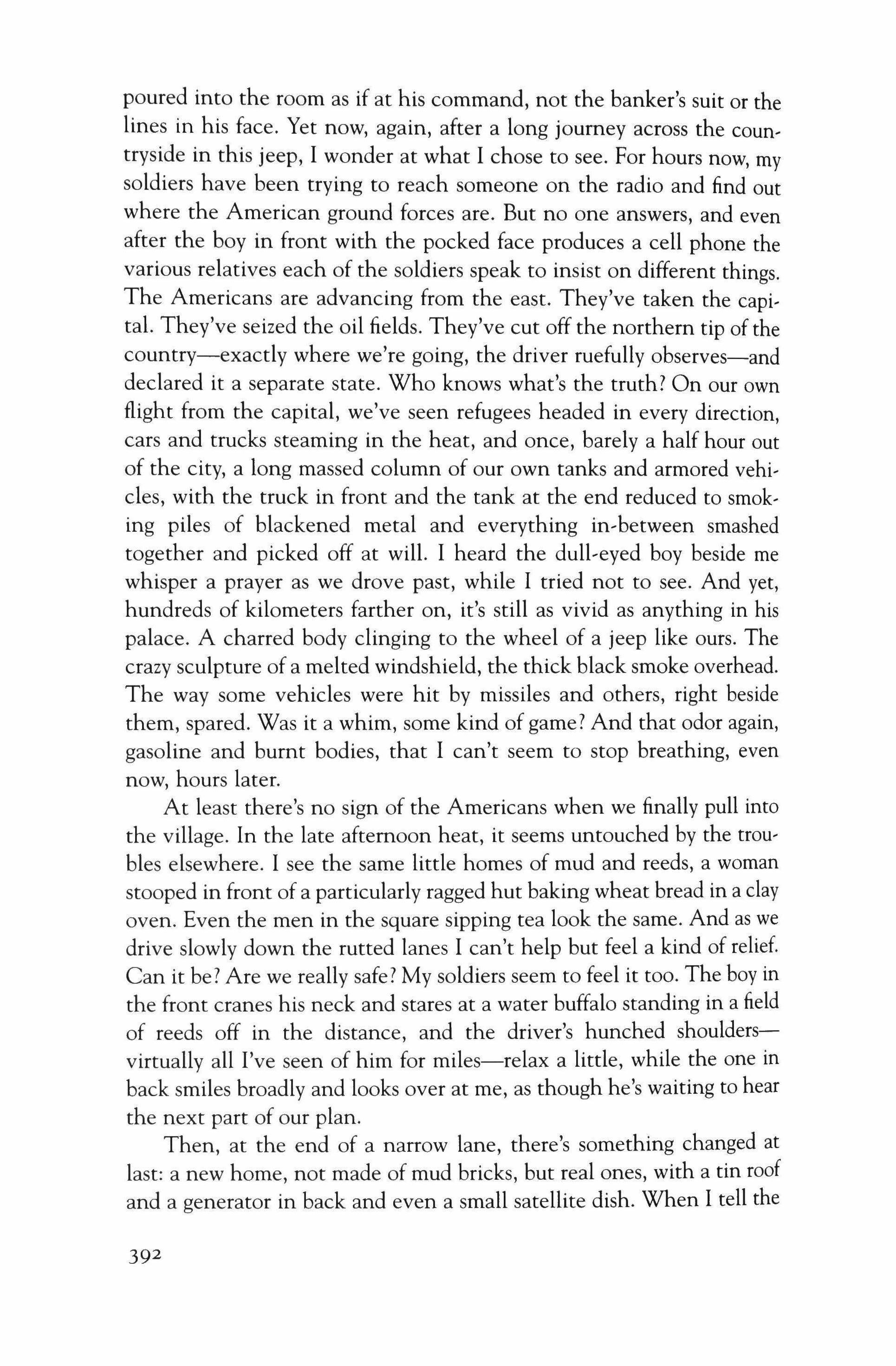
poured into the room as if at his command, not the banker's suit or the lines in his face. Yet now, again, after a long journey across the countryside in this jeep, I wonder at what I chose to see. For hours now, my soldiers have been trying to reach someone on the radio and find out where the American ground forces are. But no one answers, and even after the boy in front with the pocked face produces a cell phone the various relatives each of the soldiers speak to insist on different things. The Americans are advancing from the east. They've taken the capital. They've seized the oil fields. They've cut off the northern tip of the country-exactly where we're going, the driver ruefully observes-and declared it a separate state. Who knows what's the truth? On our own flight from the capital, we've seen refugees headed in every direction, cars and trucks steaming in the heat, and once, barely a half hour out of the city, a long massed column of our own tanks and armored vehicles, with the truck in front and the tank at the end reduced to smoking piles of blackened metal and everything in-between smashed together and picked off at will. I heard the dull-eyed boy beside me whisper a prayer as we drove past, while I tried not to see. And yet, hundreds of kilometers farther on, it's still as vivid as anything in his palace. A charred body clinging to the wheel of a jeep like ours. The crazy sculpture of a melted windshield, the thick black smoke overhead. The way some vehicles were hit by missiles and others, right beside them, spared. Was it a whim, some kind of game? And that odor again, gasoline and burnt bodies, that I can't seem to stop breathing, even now, hours later.
At least there's no sign of the Americans when we finally pull into the village. In the late afternoon heat, it seems untouched by the troubles elsewhere. I see the same little homes of mud and reeds, a woman stooped in front of a particularly ragged hut baking wheat bread in a clay oven. Even the men in the square sipping tea look the same. And as we drive slowly down the rutted lanes I can't help but feel a kind of relief. Can it be? Are we really safe? My soldiers seem to feel it too. The boy in the front cranes his neck and stares at a water buffalo standing in a field of reeds off in the distance, and the driver's hunched shouldersvirtually all I've seen of him for miles-relax a little, while the one in back smiles broadly and looks over at me, as though he's waiting to hear the next part of our plan.
Then, at the end of a narrow lane, there's something changed at last: a new home, not made of mud bricks, but real ones, with a tin roof and a generator in back and even a small satellite dish. When I tell the
392
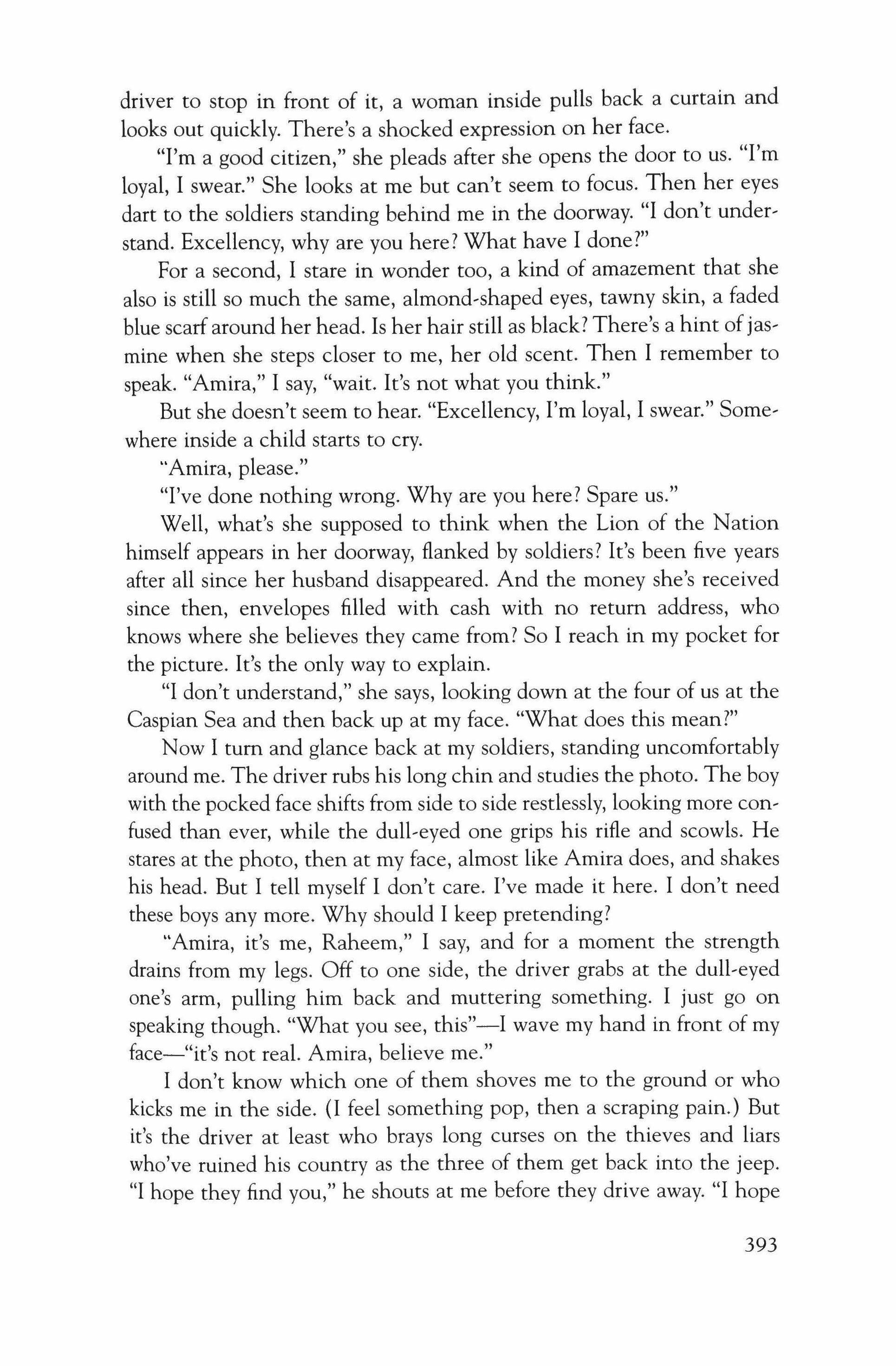
driver to stop in front of it, a woman inside pulls back a curtain and looks out quickly. There's a shocked expression on her face.
"I'm a good citizen," she pleads after she opens the door to us. "I'm loyal, I swear." She looks at me but can't seem to focus. Then her eyes dart to the soldiers standing behind me in the doorway. "I don't understand. Excellency, why are you here? What have I done?"
For a second, I stare in wonder too, a kind of amazement that she also is still so much the same, almond-shaped eyes, tawny skin, a faded blue scarf around her head. Is her hair still as black? There's a hint ofjasmine when she steps closer to me, her old scent. Then I remember to speak. "Amira," I say, "wait. It's not what you think."
But she doesn't seem to hear. "Excellency, I'm loyal, I swear." Somewhere inside a child starts to cry.
"Amira, please."
"I've done nothing wrong. Why are you here? Spare us."
Well, what's she supposed to think when the Lion of the Nation himself appears in her doorway, flanked by soldiers? It's been five years after all since her husband disappeared. And the money she's received since then, envelopes filled with cash with no return address, who knows where she believes they came from? So I reach in my pocket for the picture. It's the only way to explain.
"I don't understand," she says, looking down at the four of us at the Caspian Sea and then back up at my face. "What does this mean?"
Now I tum and glance back at my soldiers, standing uncomfortably around me. The driver rubs his long chin and studies the photo. The boy with the pocked face shifts from side to side restlessly, looking more confused than ever, while the dull-eyed one grips his rifle and scowls. He stares at the photo, then at my face, almost like Amira does, and shakes his head. But I tell myself I don't care. I've made it here. I don't need these boys any more. Why should I keep pretending?
"Amira, it's me, Raheem," I say, and for a moment the strength drains from my legs. Off to one side, the driver grabs at the dull-eyed one's arm, pulling him back and muttering something. I just go on speaking though. "What you see, this"-I wave my hand in front of my face-"it's not real. Amira, believe me."
I don't know which one of them shoves me to the ground or who kicks me in the side. (I feel something pop, then a scraping pain.) But it's the driver at least who brays long curses on the thieves and liars who've ruined his country as the three of them get back into the jeep. "I hope they find you," he shouts at me before they drive away. "I hope
393
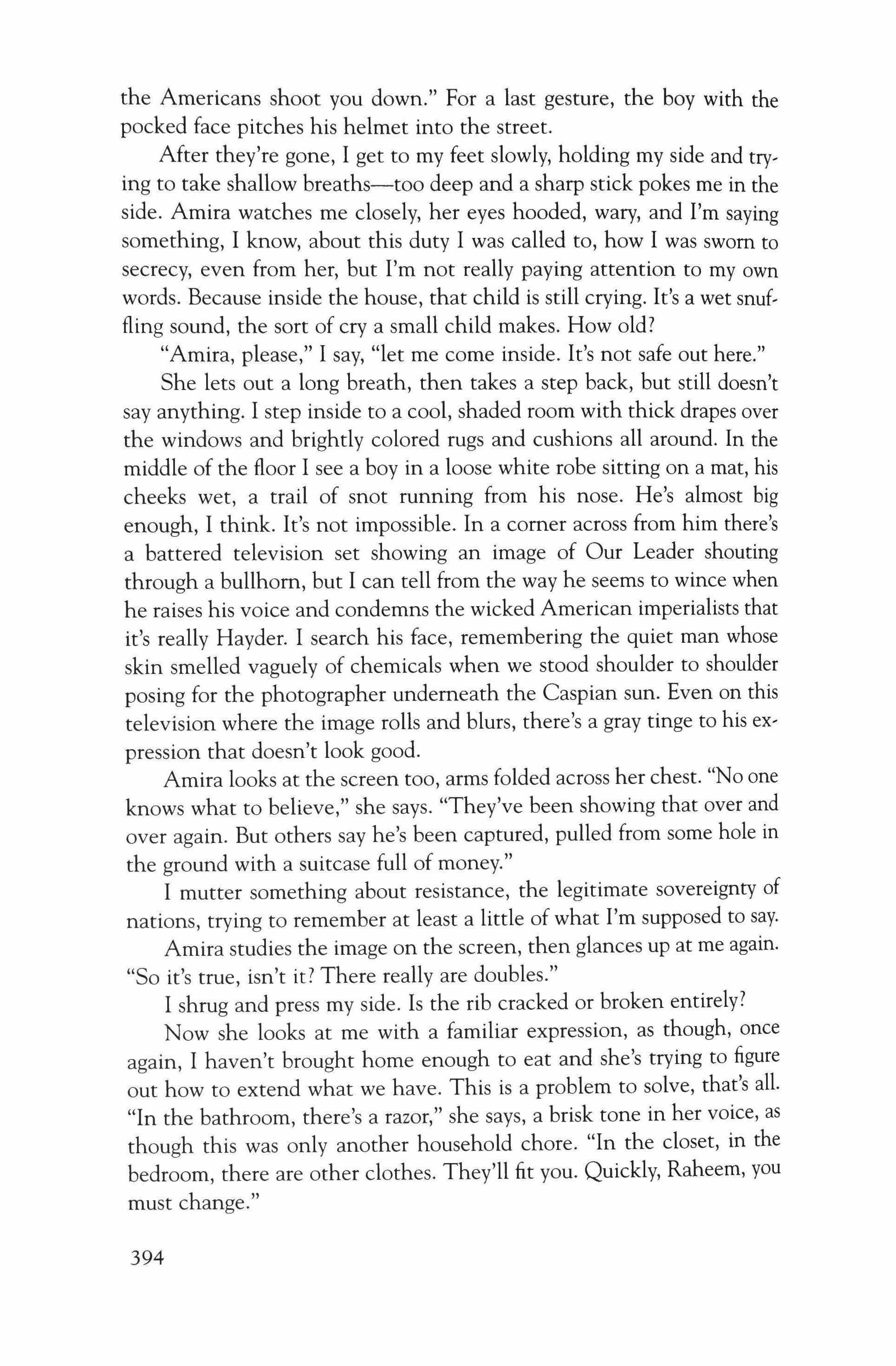
the Americans shoot you down." For a last gesture, the boy with the pocked face pitches his helmet into the street.
After they're gone, I get to my feet slowly, holding my side and trying to take shallow breaths-too deep and a sharp stick pokes me in the side. Amira watches me closely, her eyes hooded, wary, and I'm saying something, I know, about this duty I was called to, how I was sworn to secrecy, even from her, but I'm not really paying attention to my own words. Because inside the house, that child is still crying. It's a wet snuffling sound, the sort of cry a small child makes. How old?
"Arnira, please," I say, "let me come inside. It's not safe out here."
She lets out a long breath, then takes a step back, but still doesn't say anything. I step inside to a cool, shaded room with thick drapes over the windows and brightly colored rugs and cushions all around. In the middle of the floor I see a boy in a loose white robe sitting on a mat, his cheeks wet, a trail of snot running from his nose. He's almost big enough, I think. It's not impossible. In a comer across from him there's a battered television set showing an image of Our Leader shouting through a bullhorn, but I can tell from the way he seems to wince when he raises his voice and condemns the wicked American imperialists that it's really Hayder. I search his face, remembering the quiet man whose skin smelled vaguely of chemicals when we stood shoulder to shoulder posing for the photographer underneath the Caspian sun. Even on this television where the image rolls and blurs, there's a gray tinge to his expression that doesn't look good.
Amira looks at the screen too, arms folded across her chest. "No one knows what to believe," she says. "They've been showing that over and over again. But others say he's been captured, pulled from some hole in the ground with a suitcase full of money."
I mutter something about resistance, the legitimate sovereignty of nations, trying to remember at least a little of what I'm supposed to say.
Amira studies the image on the screen, then glances up at me again. "So it's true, isn't it? There really are doubles."
I shrug and press my side. Is the rib cracked or broken entirely?
Now she looks at me with a familiar expression, as though, once again, I haven't brought home enough to eat and she's trying to figure out how to extend what we have. This is a problem to solve, that's alL "In the bathroom, there's a razor," she says, a brisk tone in her voice, as though this was only another household chore. "In the closet, in the bedroom, there are other clothes. They'll fit you. Quickly, Raheem, you must change."
394
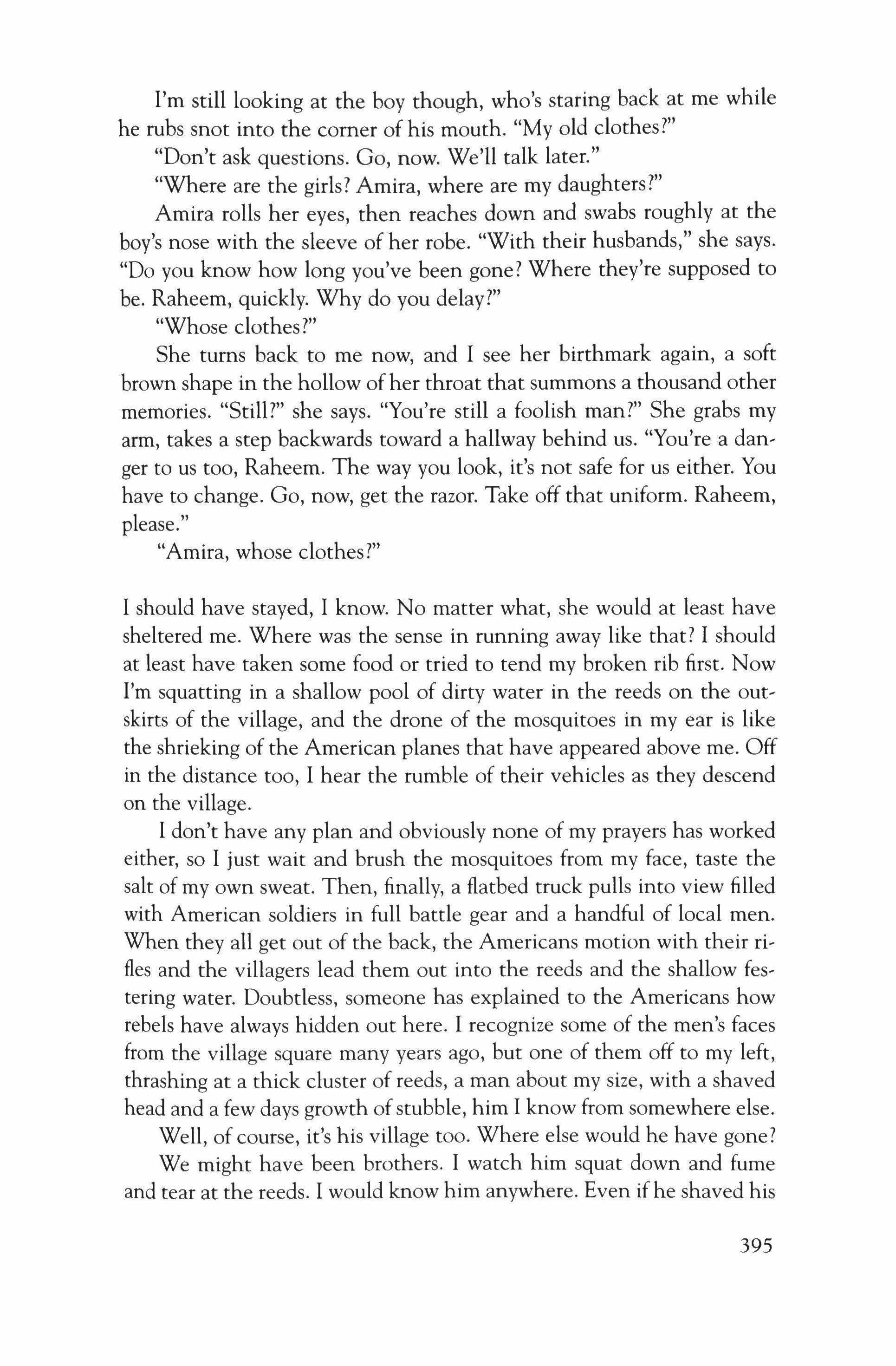
I'm still looking at the boy though, who's staring back at me while he rubs snot into the comer of his mouth. "My old clothes?"
"Don't ask questions. Go, now. We'll talk later."
"Where are the girls? Amira, where are my daughters?"
Amira rolls her eyes, then reaches down and swabs roughly at the boy's nose with the sleeve of her robe. "With their husbands," she says. "Do you know how long you've been gone? Where they're supposed to be. Raheem, quickly. Why do you delay?"
"Whose clothes?"
She turns back to me now, and I see her birthmark again, a soft brown shape in the hollow ofher throat that summons a thousand other memories. "Still?" she says. "You're still a foolish man?" She grabs my arm, takes a step backwards toward a hallway behind us. "You're a danger to us too, Raheem. The way you look, it's not safe for us either. You have to change. Go, now, get the razor. Take off that uniform. Raheem, please."
"Amira, whose clothes?"
I should have stayed, I know. No matter what, she would at least have sheltered me. Where was the sense in running away like that? I should at least have taken some food or tried to tend my broken rib first. Now I'm squatting in a shallow pool of dirty water in the reeds on the outskirts of the village, and the drone of the mosquitoes in my ear is like the shrieking of the American planes that have appeared above me. Off in the distance too, I hear the rumble of their vehicles as they descend on the village.
I don't have any plan and obviously none of my prayers has worked either, so I just wait and brush the mosquitoes from my face, taste the salt of my own sweat. Then, finally, a flatbed truck pulls into view filled with American soldiers in full battle gear and a handful of local men. When they all get out of the back, the Americans motion with their rifles and the villagers lead them out into the reeds and the shallow festering water. Doubtless, someone has explained to the Americans how rebels have always hidden out here. I recognize some of the men's faces from the village square many years ago, but one of them off to my left, thrashing at a thick cluster of reeds, a man about my size, with a shaved head and a few days growth of stubble, him I know from somewhere else.
Well, of course, it's his village too. Where else would he have gone? We might have been brothers. I watch him squat down and fume and tear at the reeds. I would know him anywhere. Even ifhe shaved his
395
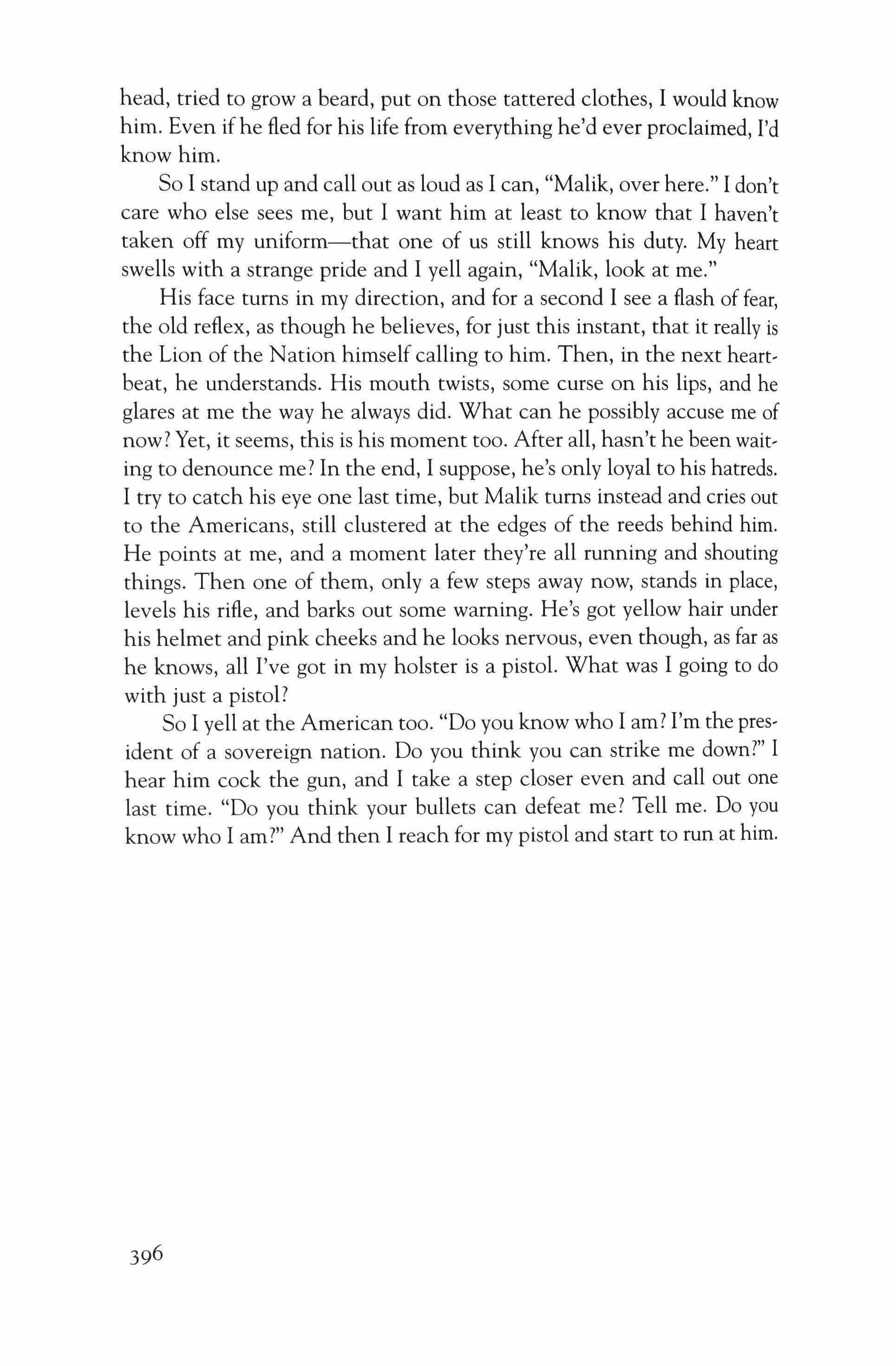
head, tried to grow a beard, put on those tattered clothes, I would know him. Even ifhe fled for his life from everything he'd ever proclaimed, I'd know him.
So I stand up and call out as loud as I can, "Malik, over here." I don't care who else sees me, but I want him at least to know that I haven't taken off my uniform-that one of us still knows his duty. My heart swells with a strange pride and I yell again, "Malik, look at me."
His face turns in my direction, and for a second I see a flash of fear, the old reflex, as though he believes, for just this instant, that it really is the Lion of the Nation himself calling to him. Then, in the next heartbeat, he understands. His mouth twists, some curse on his lips, and he glares at me the way he always did. What can he possibly accuse me of now? Yet, it seems, this is his moment too. After all, hasn't he been waiting to denounce me? In the end, I suppose, he's only loyal to his hatreds. I try to catch his eye one last time, but Malik turns instead and cries out to the Americans, still clustered at the edges of the reeds behind him. He points at me, and a moment later they're all running and shouting things. Then one of them, only a few steps away now, stands in place, levels his rifle, and barks out some warning. He's got yellow hair under his helmet and pink cheeks and he looks nervous, even though, as far as he knows, all I've got in my holster is a pistol. What was I going to do with just a pistol?
So I yell at the American too. "Do you know who I am? I'm the president of a sovereign nation. Do you think you can strike me down?" I hear him cock the gun, and I take a step closer even and call out one last time. "Do you think your bullets can defeat me? Tell me. Do you know who I am?" And then I reach for my pistol and start to run at him.
Josh Wallaert
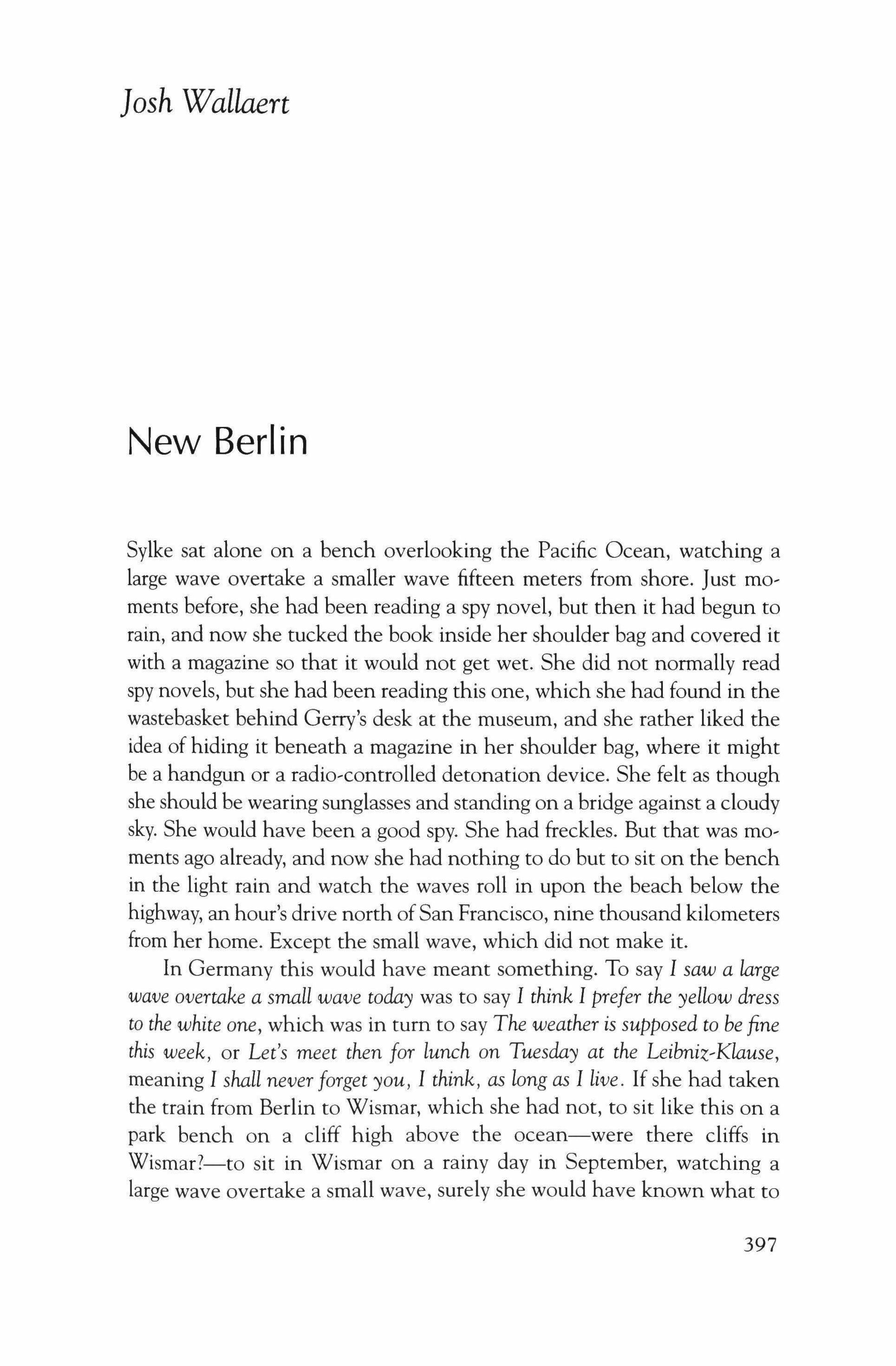
New Berlin
Sylke sat alone on a bench overlooking the Pacific Ocean, watching a large wave overtake a smaller wave fifteen meters from shore. Just moments before, she had been reading a spy novel, but then it had begun to rain, and now she tucked the book inside her shoulder bag and covered it with a magazine so that it would not get wet. She did not normally read spy novels, but she had been reading this one, which she had found in the wastebasket behind Gerry's desk at the museum, and she rather liked the idea of hiding it beneath a magazine in her shoulder bag, where it might be a handgun or a radio-controlled detonation device. She felt as though she should be wearing sunglasses and standing on a bridge against a cloudy sky. She would have been a good spy. She had freckles. But that was moments ago already, and now she had nothing to do but to sit on the bench in the light rain and watch the waves roll in upon the beach below the highway, an hour's drive north ofSan Francisco, nine thousand kilometers from her home. Except the small wave, which did not make it.
In Germany this would have meant something. To say 1 saw a large wave overtake a small wave today was to say 1 think 1 prefer the yellow dress to the white one, which was in tum to say The weather is supposed to be fine this week, or Let's meet then for lunch on Tuesday at the Leibniz,Klause, meaning 1 shall never forget you, 1 think, as long as 1 live. If she had taken the train from Berlin to Wismar, which she had not, to sit like this on a park bench on a cliff high above the ocean-were there cliffs in WismarI-to sit in Wismar on a rainy day in September, watching a large wave overtake a small wave, surely she would have known what to
397
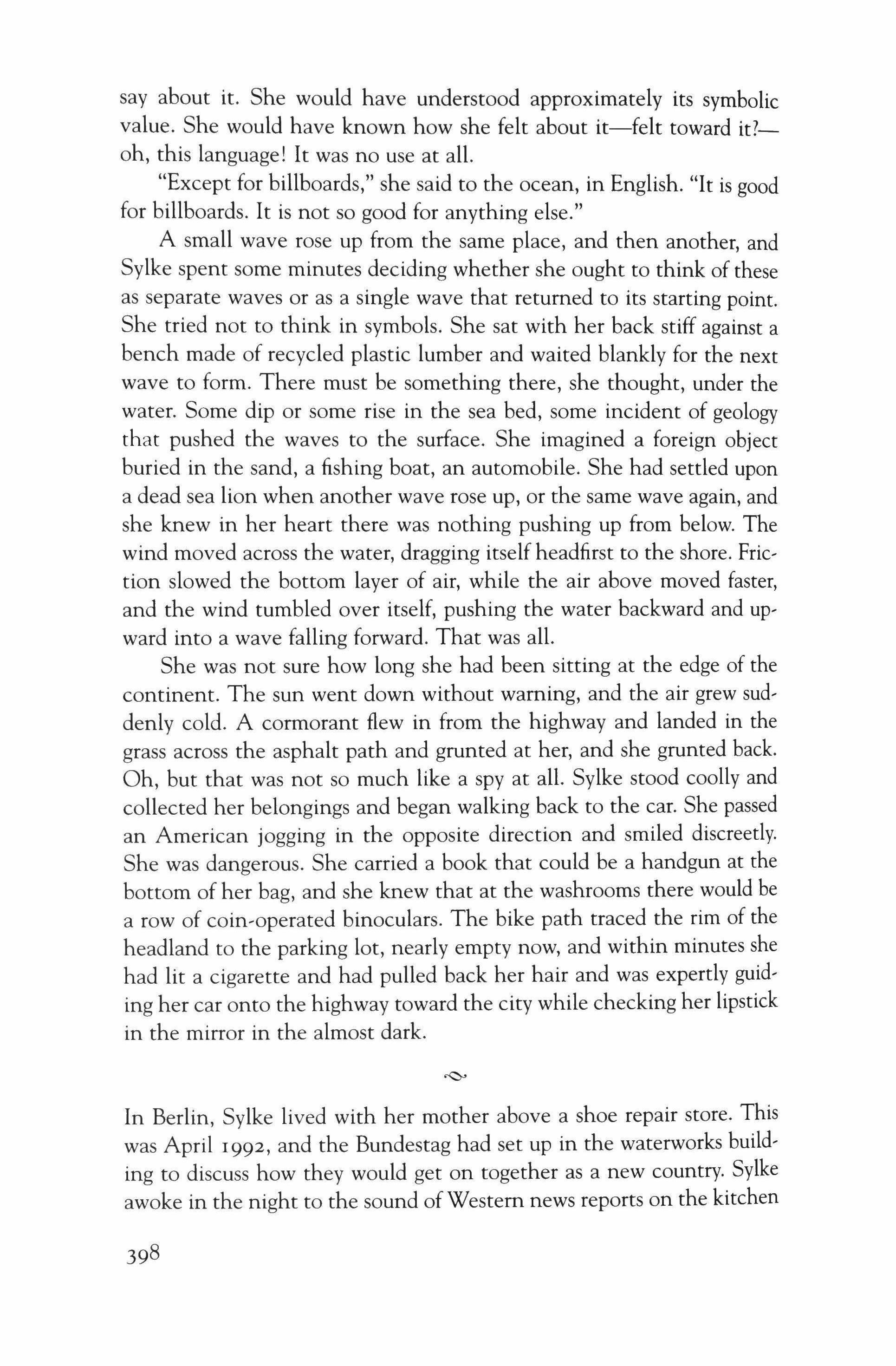
say about it. She would have understood approximately its symbolic value. She would have known how she felt about it-felt toward it?oh, this language! It was no use at all.
"Except for billboards," she said to the ocean, in English. "It is good for billboards. It is not so good for anything else."
A small wave rose up from the same place, and then another, and Sylke spent some minutes deciding whether she ought to think of these as separate waves or as a single wave that returned to its starting point. She tried not to think in symbols. She sat with her back stiff against a bench made of recycled plastic lumber and waited blankly for the next wave to form. There must be something there, she thought, under the water. Some dip or some rise in the sea bed, some incident of geology that pushed the waves to the surface. She imagined a foreign object buried in the sand, a fishing boat, an automobile. She had settled upon a dead sea lion when another wave rose up, or the same wave again, and she knew in her heart there was nothing pushing up from below. The wind moved across the water, dragging itself headfirst to the shore. Friction slowed the bottom layer of air, while the air above moved faster, and the wind tumbled over itself, pushing the water backward and upward into a wave falling forward. That was all.
She was not sure how long she had been sitting at the edge of the continent. The sun went down without warning, and the air grew suddenly cold. A cormorant flew in from the highway and landed in the grass across the asphalt path and grunted at her, and she grunted back. Oh, but that was not so much like a spy at all. Sylke stood coolly and collected her belongings and began walking back to the car. She passed an American jogging in the opposite direction and smiled discreetly. She was dangerous. She carried a book that could be a handgun at the bottom of her bag, and she knew that at the washrooms there would be a row of coin-operated binoculars. The bike path traced the rim of the headland to the parking lot, nearly empty now, and within minutes she had lit a cigarette and had pulled back her hair and was expertly guiding her car onto the highway toward the city while checking her lipstick in the mirror in the almost dark.
In Berlin, Sylke lived with her mother above a shoe repair store. This was April 1992, and the Bundestag had set up in the waterworks building to discuss how they would get on together as a new country. Sylke awoke in the night to the sound ofWestern news reports on the kitchen
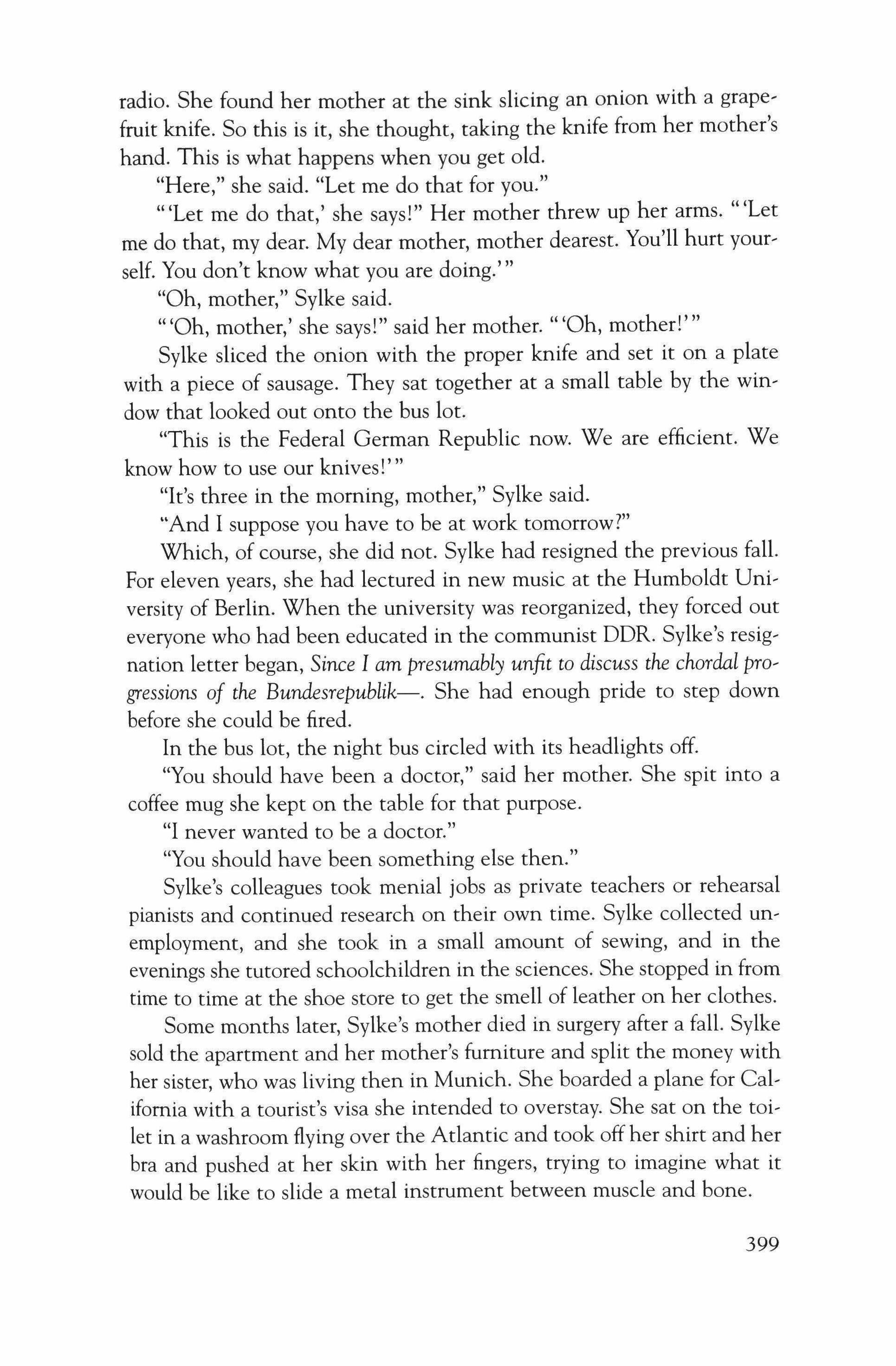
radio. She found her mother at the sink slicing an onion with a grape� fruit knife. So this is it, she thought, taking the knife from her mother's hand. This is what happens when you get old.
"Here," she said. "Let me do that for you."
'''Let me do that,' she says!" Her mother threw up her arms. '''Let me do that, my dear. My dear mother, mother dearest. You'll hurt yourself. You don't know what you are doing.'"
"Oh, mother," Sylke said.
"'Oh, mother,' she says!" said her mother. '''Oh, mother!"
Sylke sliced the onion with the proper knife and set it on a plate with a piece of sausage. They sat together at a small table by the window that looked out onto the bus lot.
"This is the Federal German Republic now. We are efficient. We know how to use our knives!'"
"It's three in the morning, mother," Sylke said.
"And I suppose you have to be at work tomorrow?"
Which, of course, she did not. Sylke had resigned the previous fall. For eleven years, she had lectured in new music at the Humboldt University of Berlin. When the university was reorganized, they forced out everyone who had been educated in the communist DDR. Sylke's resignation letter began, Since I am presumably unfit to discuss the chordal progressions of the Bundesrepublik-. She had enough pride to step down before she could be fired.
In the bus lot, the night bus circled with its headlights off.
"You should have been a doctor," said her mother. She spit into a coffee mug she kept on the table for that purpose.
"I never wanted to be a doctor."
"You should have been something else then."
Sylke's colleagues took menial jobs as private teachers or rehearsal pianists and continued research on their own time. Sylke collected unemployment, and she took in a small amount of sewing, and in the evenings she tutored schoolchildren in the sciences. She stopped in from time to time at the shoe store to get the smell of leather on her clothes.
Some months later, Sylke's mother died in surgery after a fall. Sylke sold the apartment and her mother's furniture and split the money with her sister, who was living then in Munich. She boarded a plane for California with a tourist's visa she intended to overstay. She sat on the toilet in a washroom flying over the Atlantic and took off her shirt and her bra and pushed at her skin with her fingers, trying to imagine what it would be like to slide a metal instrument between muscle and bone.
399
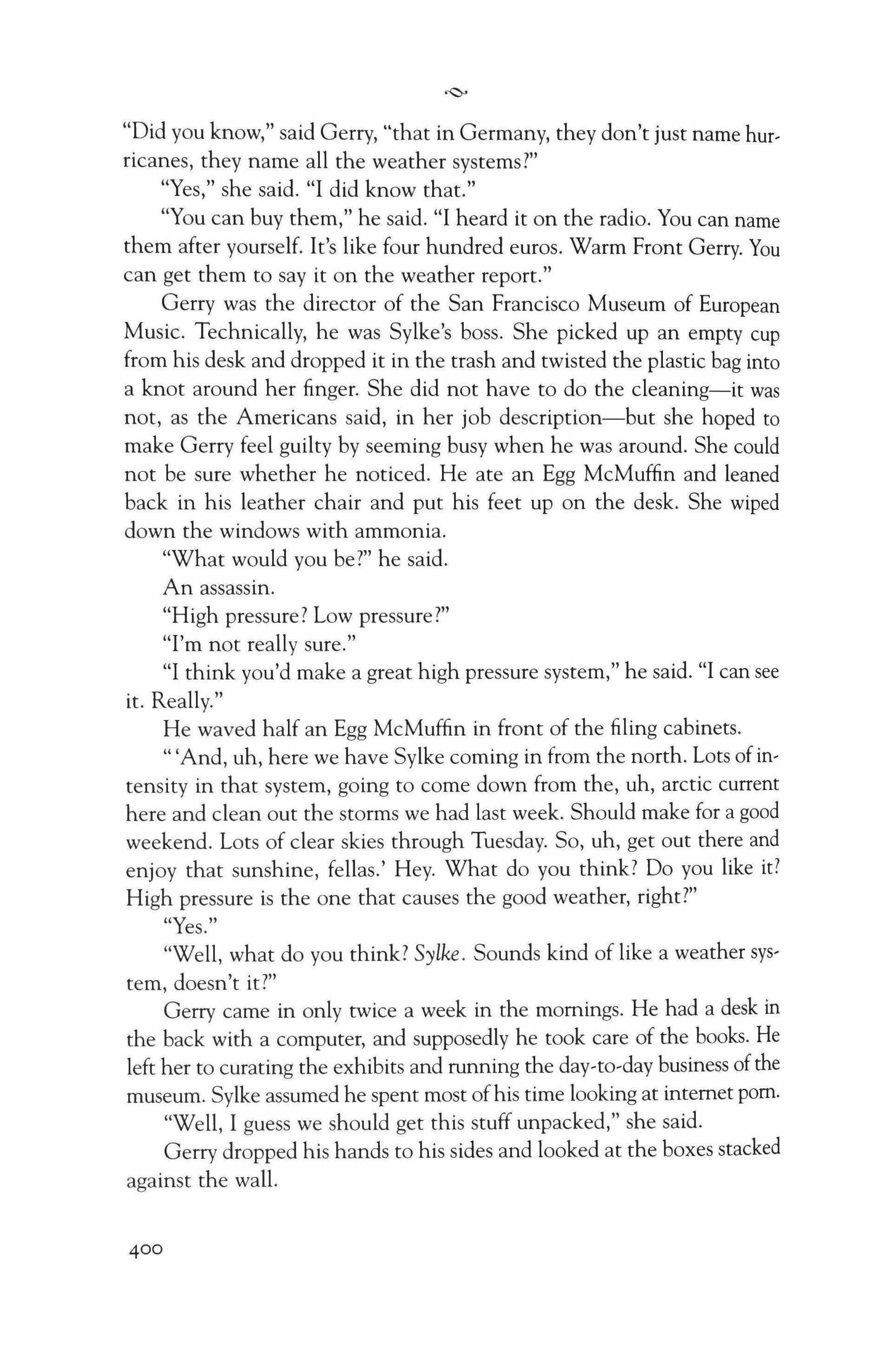
"Did you know," said Gerry, "that in Germany, they don't just name hurricanes, they name all the weather systems?"
"Yes," she said. "I did know that."
"You can buy them," he said. "I heard it on the radio. You can name them after yourself. It's like four hundred euros. Warm Front Gerry. You can get them to say it on the weather report."
Gerry was the director of the San Francisco Museum of European Music. Technically, he was Sylke's boss. She picked up an empty cup from his desk and dropped it in the trash and twisted the plastic bag into a knot around her finger. She did not have to do the cleaning-it was not, as the Americans said, in her job description-but she hoped to make Gerry feel guilty by seeming busy when he was around. She could not be sure whether he noticed. He ate an Egg McMuffin and leaned back in his leather chair and put his feet up on the desk. She wiped down the windows with ammonia.
"What would you be?" he said.
An assassin.
"High pressure? Low pressure?"
"I'm not really sure."
"I think you'd make a great high pressure system," he said. "I can see it. Really."
He waved half an Egg McMuffin in front of the filing cabinets.
"'And, uh, here we have Sylke coming in from the north. Lots of intensity in that system, going to come down from the, uh, arctic current here and clean out the storms we had last week. Should make for a good weekend. Lots of clear skies through Tuesday. So, uh, get out there and enjoy that sunshine, fellas.' Hey. What do you think? Do you like it? High pressure is the one that causes the good weather, right?"
"Yes."
"Well, what do you think? Sylke. Sounds kind of like a weather system, doesn't it?"
Gerry came in only twice a week in the mornings. He had a desk in the back with a computer, and supposedly he took care of the books. He left her to curating the exhibits and running the day-to-day business ofthe museum. Sylke assumed he spent most ofhis time looking at internet porn.
"Well, I guess we should get this stuff unpacked," she said.
Gerry dropped his hands to his sides and looked at the boxes stacked against the wall.
400
"Yeah," he said. "Sure thing. Let me help. Hey, what do you think about a German name for my dog? Shelley got this dog the other day at the pound. Part terrier, I think. Real cute. I was thinking he kind of looks like an Otto."
In the afternoons, she had the museum to herself. She sat quietly at Gerry's desk, listening to the ventilation system and preparing the text of the exhibits and doing sudoku puzzles, unless there were visitors, which occasionally there were.
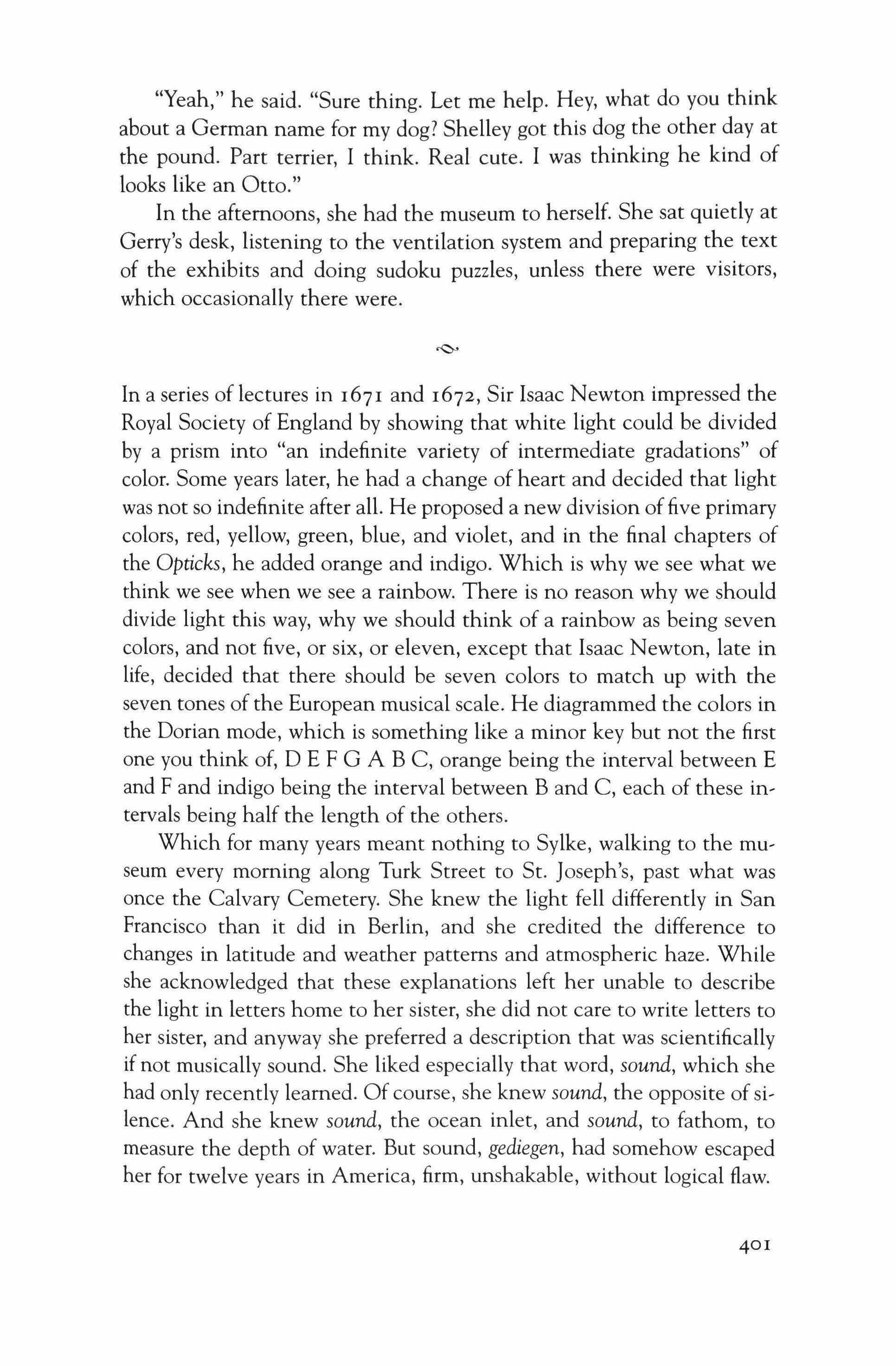
In a series oflectures in 1671 and 1672, Sir Isaac Newton impressed the Royal Society of England by showing that white light could be divided by a prism into "an indefinite variety of intermediate gradations" of color. Some years later, he had a change of heart and decided that light was not so indefinite after all. He proposed a new division offive primary colors, red, yellow, green, blue, and violet, and in the final chapters of the Opticks, he added orange and indigo. Which is why we see what we think we see when we see a rainbow. There is no reason why we should divide light this way, why we should think of a rainbow as being seven colors, and not five, or six, or eleven, except that Isaac Newton, late in life, decided that there should be seven colors to match up with the seven tones of the European musical scale. He diagrammed the colors in the Dorian mode, which is something like a minor key but not the first one you think of, D E F GAB C, orange being the interval between E and F and indigo being the interval between Band C, each of these intervals being half the length of the others.
Which for many years meant nothing to Sylke, walking to the museum every morning along Turk Street to St. Joseph's, past what was once the Calvary Cemetery. She knew the light fell differently in San Francisco than it did in Berlin, and she credited the difference to changes in latitude and weather patterns and atmospheric haze. While she acknowledged that these explanations left her unable to describe the light in letters home to her sister, she did not care to write letters to her sister, and anyway she preferred a description that was scientifically if not musically sound. She liked especially that word, sound, which she had only recently learned. Of course, she knew sound, the opposite of silence. And she knew sound, the ocean inlet, and sound, to fathom, to measure the depth of water. But sound, gediegen, had somehow escaped her for twelve years in America, firm, unshakable, without logical flaw.
401
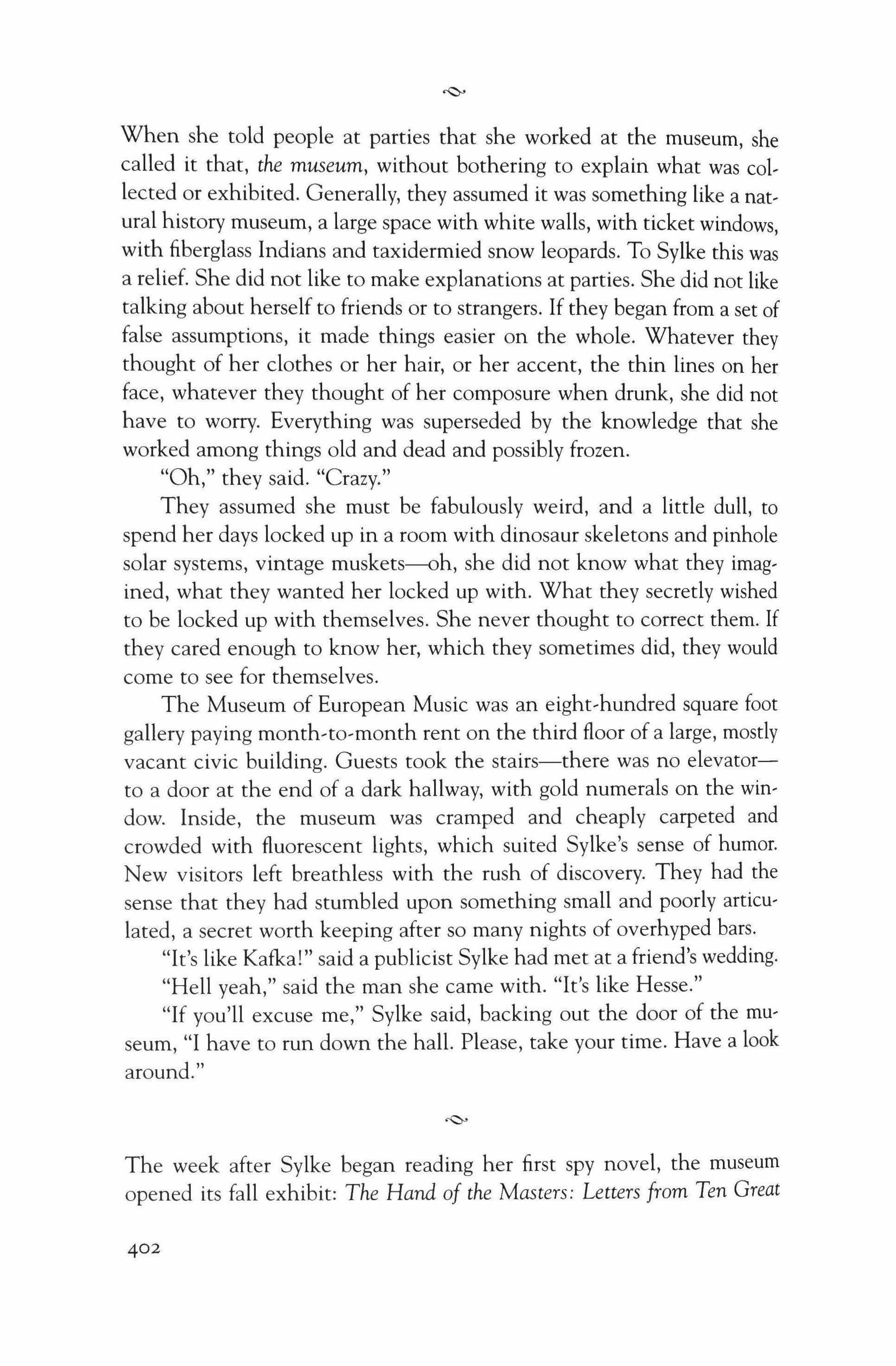
When she told people at parties that she worked at the museum, she called it that, the museum, without bothering to explain what was collected or exhibited. Generally, they assumed it was something like a natural history museum, a large space with white walls, with ticket windows, with fiberglass Indians and taxidermied snow leopards. To Sylke this was a relief. She did not like to make explanations at parties. She did not like talking about herself to friends or to strangers. If they began from a set of false assumptions, it made things easier on the whole. Whatever they thought of her clothes or her hair, or her accent, the thin lines on her face, whatever they thought of her composure when drunk, she did not have to worry. Everything was superseded by the knowledge that she worked among things old and dead and possibly frozen.
"Oh," they said. "Crazy."
They assumed she must be fabulously weird, and a little dull, to spend her days locked up in a room with dinosaur skeletons and pinhole solar systems, vintage muskets--oh, she did not know what they imagined, what they wanted her locked up with. What they secretly wished to be locked up with themselves. She never thought to correct them. If they cared enough to know her, which they sometimes did, they would come to see for themselves.
The Museum of European Music was an eight-hundred square foot gallery paying month-to-month rent on the third floor of a large, mostly vacant civic building. Guests took the stairs-there was no elevatorto a door at the end of a dark hallway, with gold numerals on the window. Inside, the museum was cramped and cheaply carpeted and crowded with fluorescent lights, which suited Sylke's sense of humor. New visitors left breathless with the rush of discovery. They had the sense that they had stumbled upon something small and poorly articulated, a secret worth keeping after so many nights of overhyped bars.
"It's like Kafka!" said a publicist Sylke had met at a friend's wedding.
"Hell yeah," said the man she came with. "It's like Hesse."
"If you'll excuse me," Sylke said, backing out the door of the museum, "I have to run down the hall. Please, take your time. Have a look around." The week after Sylke began reading her first spy novel, the museum opened its fall exhibit: The Hand of the Masters: Letters from Ten Great
402
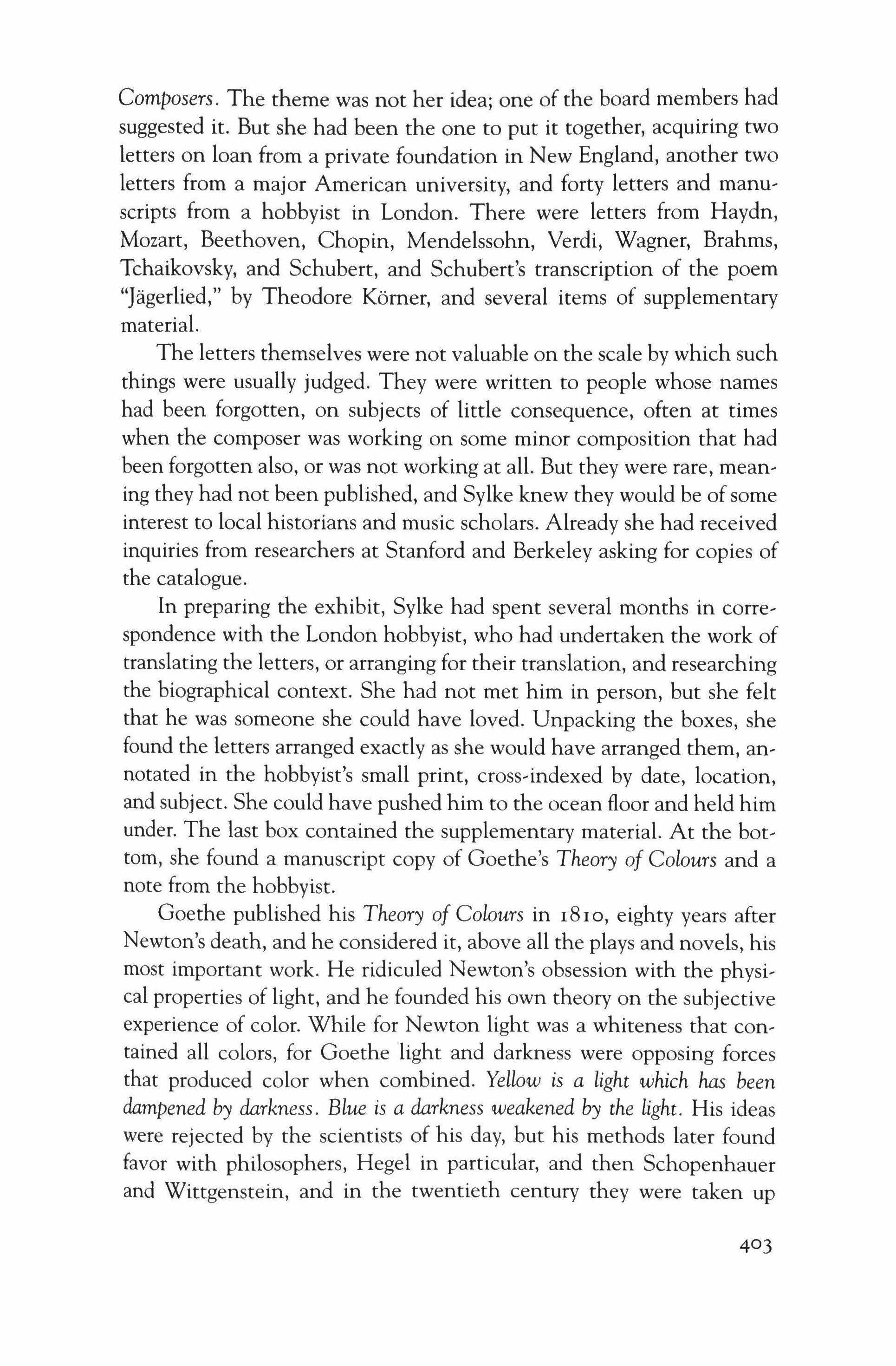
Composers. The theme was not her idea; one of the board members had suggested it. But she had been the one to put it together, acquiring two letters on loan from a private foundation in New England, another two letters from a major American university, and forty letters and manuscripts from a hobbyist in London. There were letters from Haydn, Mozart, Beethoven, Chopin, Mendelssohn, Verdi, Wagner, Brahms, Tchaikovsky, and Schubert, and Schubert's transcription of the poem "[agerlied," by Theodore Komer, and several items of supplementary material.
The letters themselves were not valuable on the scale by which such things were usually judged. They were written to people whose names had been forgotten, on subjects of little consequence, often at times when the composer was working on some minor composition that had been forgotten also, or was not working at all. But they were rare, meaning they had not been published, and Sylke knew they would be of some interest to local historians and music scholars. Already she had received inquiries from researchers at Stanford and Berkeley asking for copies of the catalogue.
In preparing the exhibit, Sylke had spent several months in correspondence with the London hobbyist, who had undertaken the work of translating the letters, or arranging for their translation, and researching the biographical context. She had not met him in person, but she felt that he was someone she could have loved. Unpacking the boxes, she found the letters arranged exactly as she would have arranged them, annotated in the hobbyist's small print, cross-indexed by date, location, and subject. She could have pushed him to the ocean floor and held him under. The last box contained the supplementary material. At the bottom, she found a manuscript copy of Goethe's Theory of Colours and a note from the hobbyist.
Goethe published his Theory of Colours in 18 I 0, eighty years after Newton's death, and he considered it, above all the plays and novels, his most important work. He ridiculed Newton's obsession with the physical properties of light, and he founded his own theory on the subjective experience of color. While for Newton light was a whiteness that contained all colors, for Goethe light and darkness were opposing forces that produced color when combined. Yellow is a light which has been dampened by darkness. Blue is a darkness weakened by the light. His ideas were rejected by the scientists of his day, but his methods later found favor with philosophers, Hegel in particular, and then Schopenhauer and Wittgenstein, and in the twentieth century they were taken up
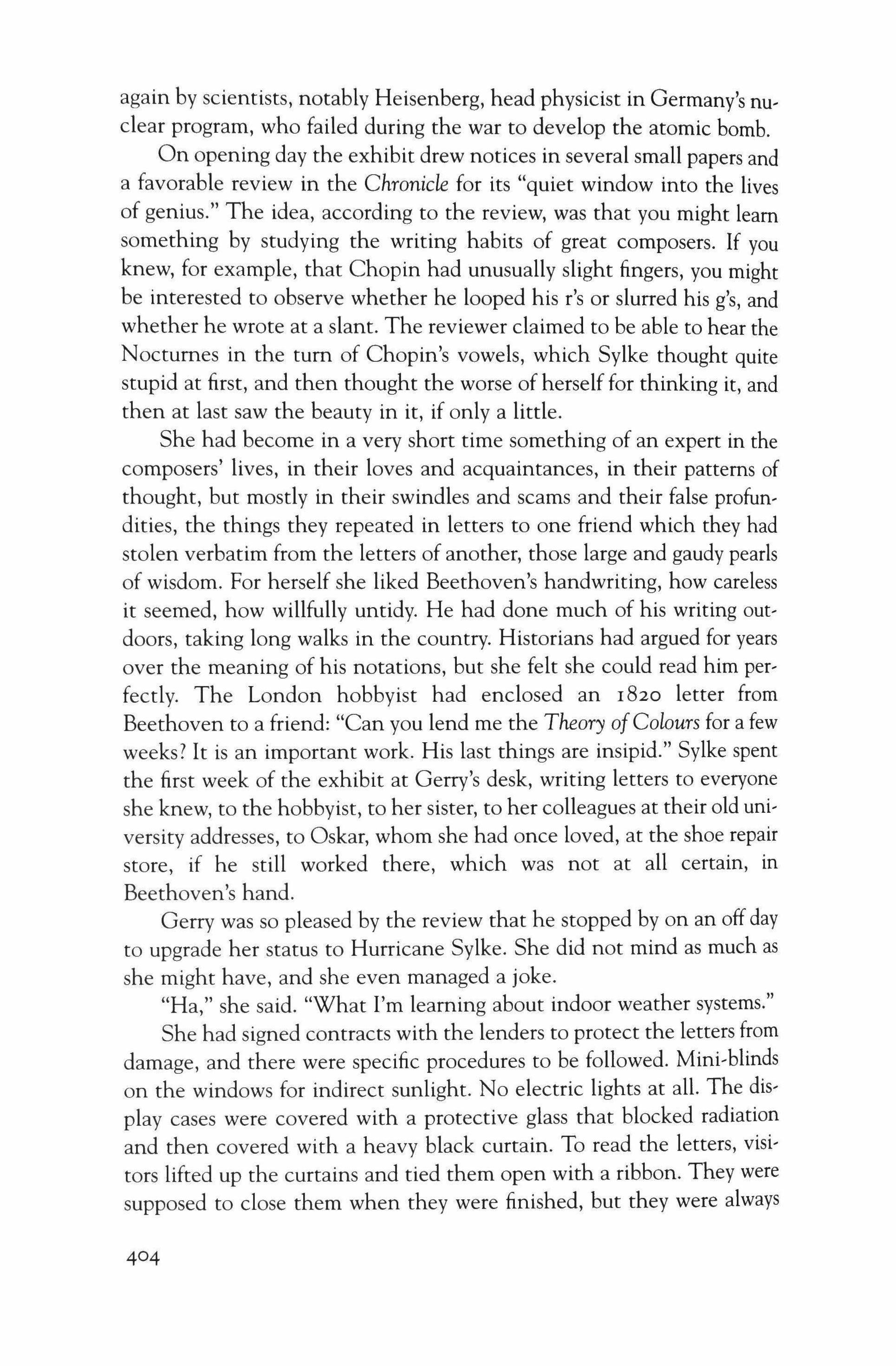
again by scientists, notably Heisenberg, head physicist in Germany's nuclear program, who failed during the war to develop the atomic bomb.
On opening day the exhibit drew notices in several small papers and a favorable review in the Chronicle for its "quiet window into the lives of genius." The idea, according to the review, was that you might learn something by studying the writing habits of great composers. If you knew, for example, that Chopin had unusually slight fingers, you might be interested to observe whether he looped his r's or slurred his g's, and whether he wrote at a slant. The reviewer claimed to be able to hear the Nocturnes in the tum of Chopin's vowels, which Sylke thought quite stupid at first, and then thought the worse of herself for thinking it, and then at last saw the beauty in it, if only a little.
She had become in a very short time something of an expert in the composers' lives, in their loves and acquaintances, in their patterns of thought, but mostly in their swindles and scams and their false profundities, the things they repeated in letters to one friend which they had stolen verbatim from the letters of another, those large and gaudy pearls of wisdom. For herself she liked Beethoven's handwriting, how careless it seemed, how willfully untidy. He had done much of his writing outdoors, taking long walks in the country. Historians had argued for years over the meaning of his notations, but she felt she could read him perfectly. The London hobbyist had enclosed an 1820 letter from Beethoven to a friend: "Can you lend me the Theory ofColours for a few weeks? It is an important work. His last things are insipid." Sylke spent the first week of the exhibit at Gerry's desk, writing letters to everyone she knew, to the hobbyist, to her sister, to her colleagues at their old university addresses, to Oskar, whom she had once loved, at the shoe repair store, if he still worked there, which was not at all certain, in Beethoven's hand.
Gerry was so pleased by the review that he stopped by on an off day to upgrade her status to Hurricane Sylke. She did not mind as much as she might have, and she even managed a joke.
"Ha," she said. "What I'm learning about indoor weather systems."
She had signed contracts with the lenders to protect the letters from damage, and there were specific procedures to be followed. Mini-blinds on the windows for indirect sunlight. No electric lights at all. The display cases were covered with a protective glass that blocked radiation and then covered with a heavy black curtain. To read the letters, visitors lifted up the curtains and tied them open with a ribbon. They were supposed to close them when they were finished, but they were always
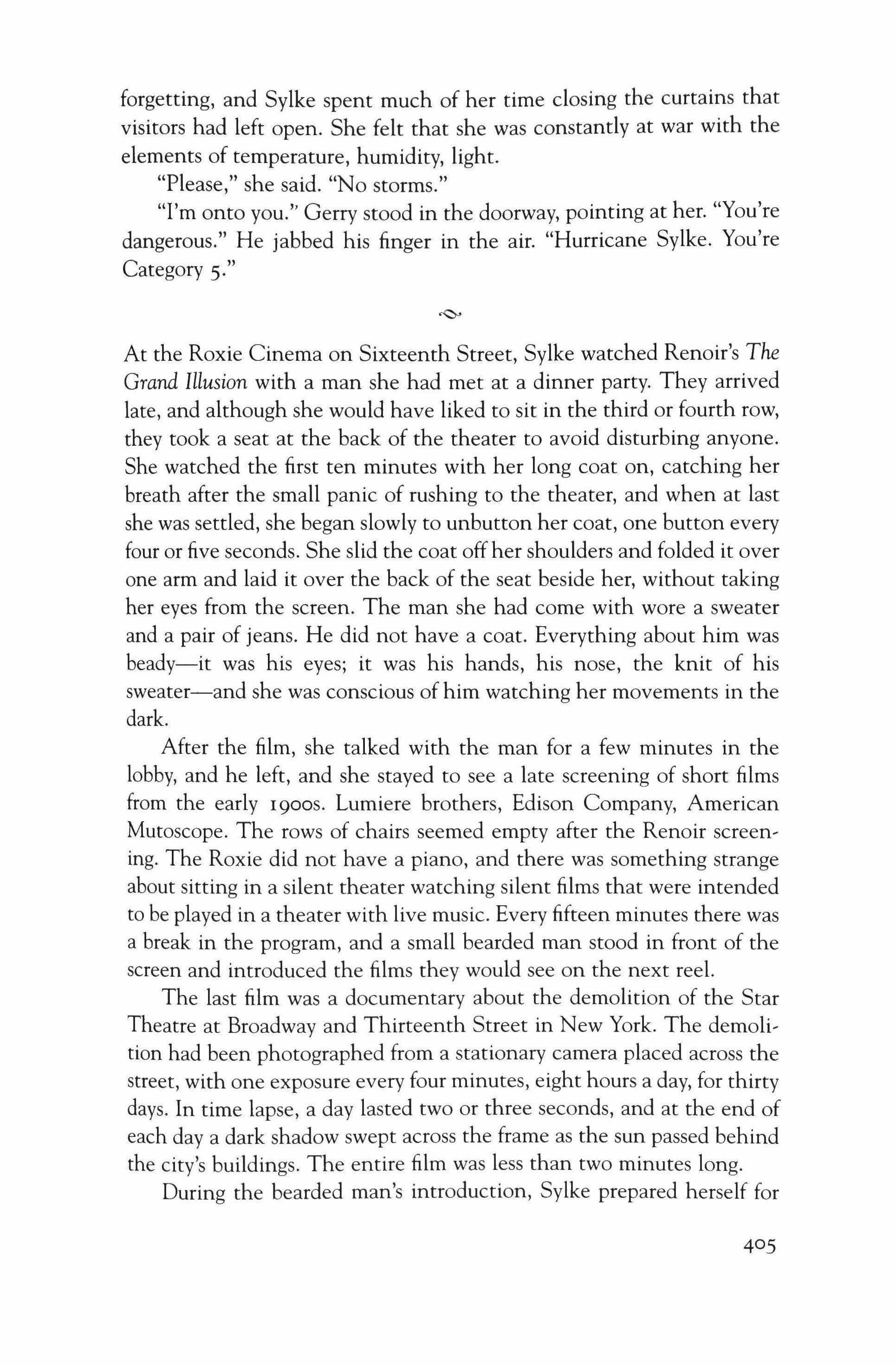
forgetting, and Sylke spent much of her time closing the curtains that visitors had left open. She felt that she was constantly at war with the elements of temperature, humidity, light.
"Please," she said. "No storms."
"I'm onto you." Gerry stood in the doorway, pointing at her. "You're dangerous." He jabbed his finger in the air. "Hurricane Sylke. You're Category 5."
At the Roxie Cinema on Sixteenth Street, Sylke watched Renoir's The Grand Illusion with a man she had met at a dinner party. They arrived late, and although she would have liked to sit in the third or fourth row, they took a seat at the back of the theater to avoid disturbing anyone. She watched the first ten minutes with her long coat on, catching her breath after the small panic of rushing to the theater, and when at last she was settled, she began slowly to unbutton her coat, one button every four or five seconds. She slid the coat offher shoulders and folded it over one arm and laid it over the back of the seat beside her, without taking her eyes from the screen. The man she had come with wore a sweater and a pair of jeans. He did not have a coat. Everything about him was beady-it was his eyes; it was his hands, his nose, the knit of his sweater-and she was conscious of him watching her movements in the dark.
After the film, she talked with the man for a few minutes in the lobby, and he left, and she stayed to see a late screening of short films from the early I900s. Lumiere brothers, Edison Company, American Mutoscope. The rows of chairs seemed empty after the Renoir screening. The Roxie did not have a piano, and there was something strange about sitting in a silent theater watching silent films that were intended to be played in a theater with live music. Every fifteen minutes there was a break in the program, and a small bearded man stood in front of the screen and introduced the films they would see on the next reel.
The last film was a documentary about the demolition of the Star Theatre at Broadway and Thirteenth Street in New York. The demolition had been photographed from a stationary camera placed across the street, with one exposure every four minutes, eight hours a day, for thirty days. In time lapse, a day lasted two or three seconds, and at the end of each day a dark shadow swept across the frame as the sun passed behind the city's buildings. The entire film was less than two minutes long.
During the bearded man's introduction, Sylke prepared herself for
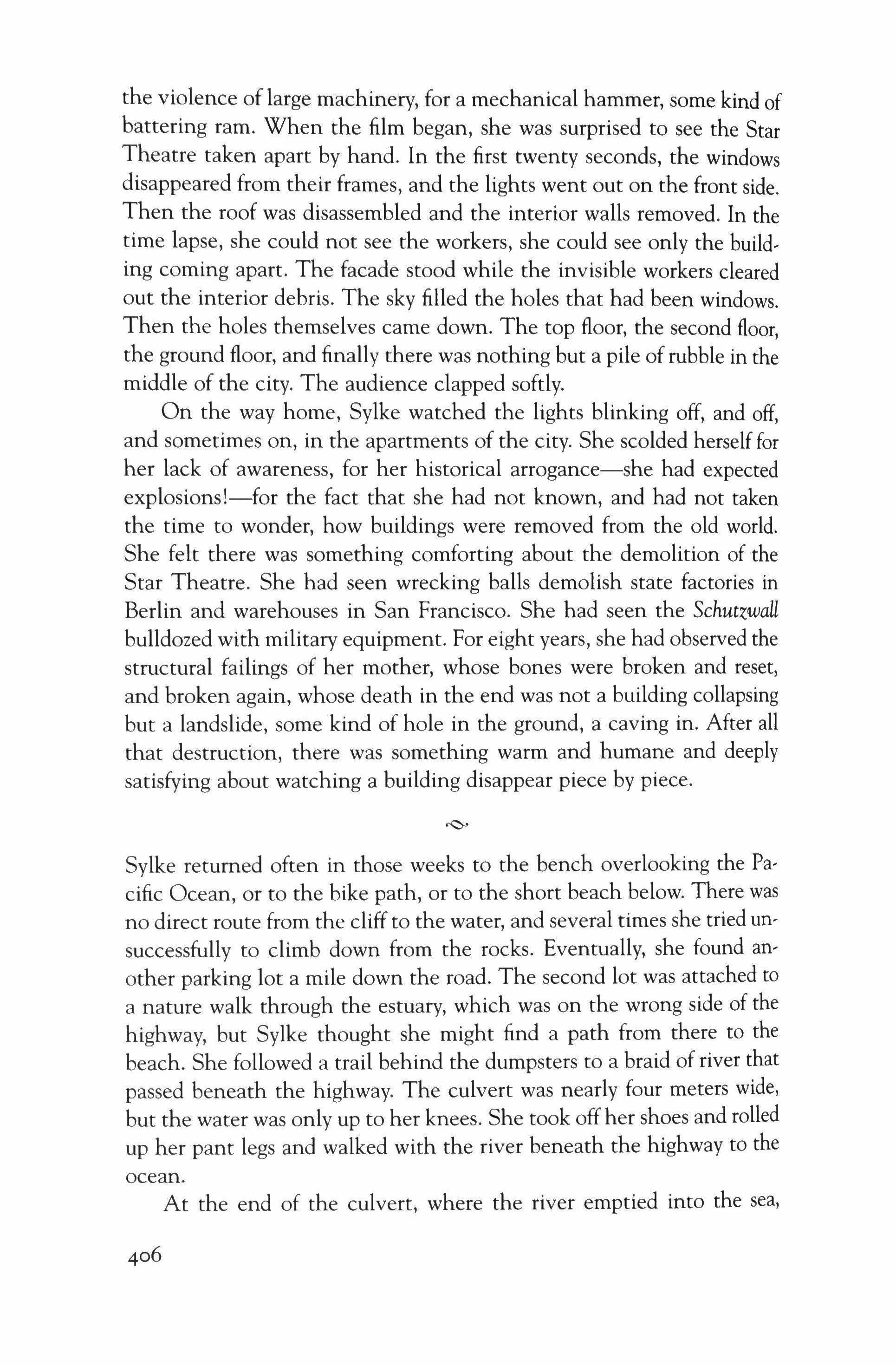
the violence of large machinery, for a mechanical hammer, some kind of battering ram. When the film began, she was surprised to see the Star Theatre taken apart by hand. In the first twenty seconds, the windows disappeared from their frames, and the lights went out on the front side. Then the roof was disassembled and the interior walls removed. In the time lapse, she could not see the workers, she could see only the building coming apart. The facade stood while the invisible workers cleared out the interior debris. The sky filled the holes that had been windows. Then the holes themselves came down. The top floor, the second floor, the ground floor, and finally there was nothing but a pile of rubble in the middle of the city. The audience clapped softly.
On the way home, Sylke watched the lights blinking off, and off, and sometimes on, in the apartments of the city. She scolded herself for her lack of awareness, for her historical arrogance-she had expected explosions!-for the fact that she had not known, and had not taken the time to wonder, how buildings were removed from the old world. She felt there was something comforting about the demolition of the Star Theatre. She had seen wrecking balls demolish state factories in Berlin and warehouses in San Francisco. She had seen the Schutzwall bulldozed with military equipment. For eight years, she had observed the structural failings of her mother, whose bones were broken and reset, and broken again, whose death in the end was not a building collapsing but a landslide, some kind of hole in the ground, a caving in. After all that destruction, there was something warm and humane and deeply satisfying about watching a building disappear piece by piece.
Sylke returned often in those weeks to the bench overlooking the Pacific Ocean, or to the bike path, or to the short beach below. There was no direct route from the cliff to the water, and several times she tried unsuccessfully to climb down from the rocks. Eventually, she found another parking lot a mile down the road. The second lot was attached to a nature walk through the estuary, which was on the wrong side of the highway, but Sylke thought she might find a path from there to the beach. She followed a trail behind the dumpsters to a braid of river that passed beneath the highway. The culvert was nearly four meters wide, but the water was only up to her knees. She took offher shoes and rolled up her pant legs and walked with the river beneath the highway to the ocean.
At the end of the culvert, where the river emptied into the sea,
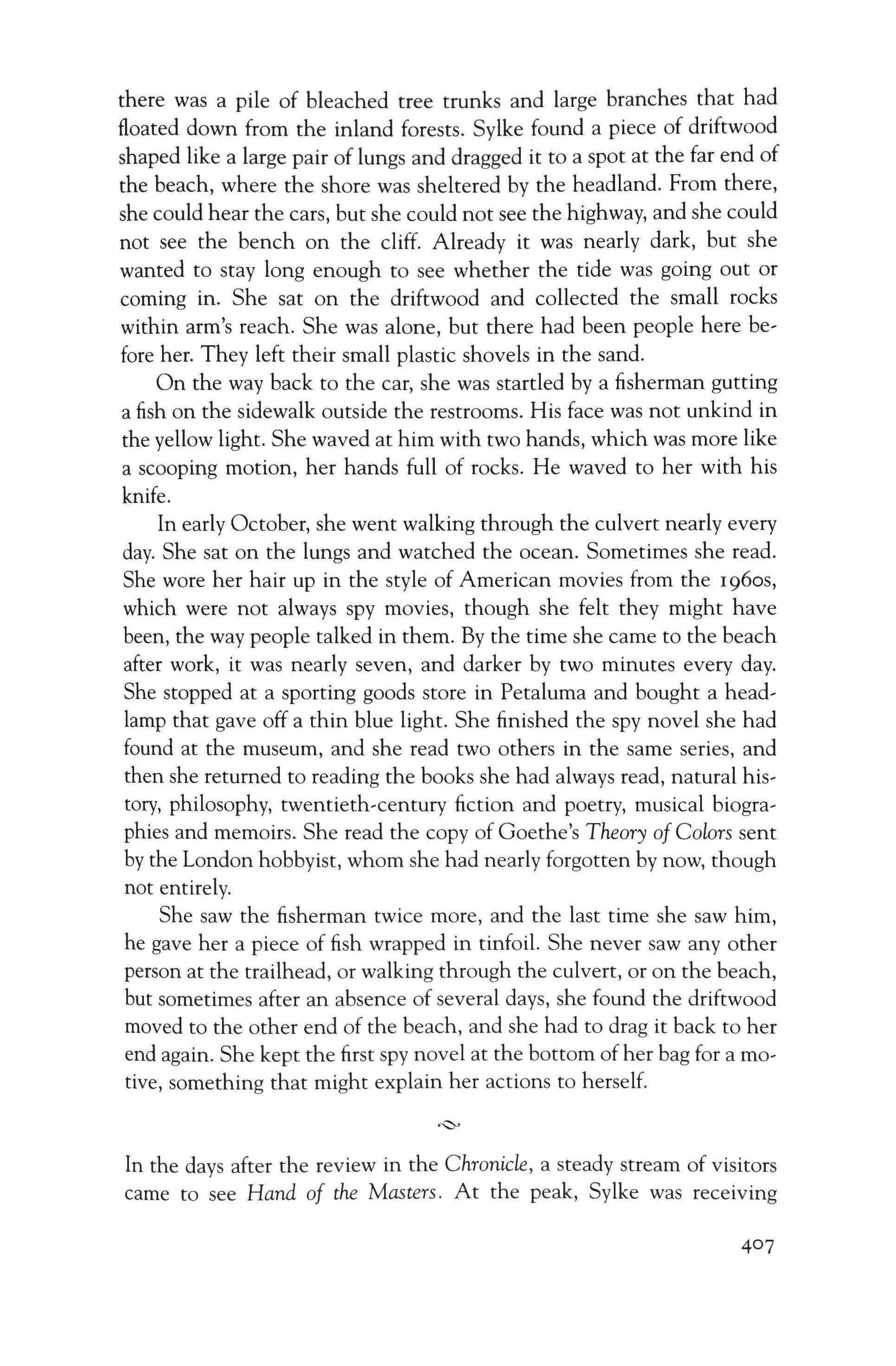
there was a pile of bleached tree trunks and large branches that had floated down from the inland forests. Sylke found a piece of driftwood shaped like a large pair of lungs and dragged it to a spot at the far end of the beach, where the shore was sheltered by the headland. From there, she could hear the cars, but she could not see the highway, and she could not see the bench on the cliff. Already it was nearly dark, but she wanted to stay long enough to see whether the tide was going out or coming in. She sat on the driftwood and collected the small rocks within arm's reach. She was alone, but there had been people here be' fore her. They left their small plastic shovels in the sand.
On the way back to the car, she was startled by a fisherman gutting a fish on the sidewalk outside the restrooms. His face was not unkind in the yellow light. She waved at him with two hands, which was more like a scooping motion, her hands full of rocks. He waved to her with his knife.
In early October, she went walking through the culvert nearly every day. She sat on the lungs and watched the ocean. Sometimes she read. She wore her hair up in the style of American movies from the 1960s, which were not always spy movies, though she felt they might have been, the way people talked in them. By the time she came to the beach after work, it was nearly seven, and darker by two minutes every day. She stopped at a sporting goods store in Petaluma and bought a head, lamp that gave off a thin blue light. She finished the spy novel she had found at the museum, and she read two others in the same series, and then she returned to reading the books she had always read, natural his, tory, philosophy, twentieth,century fiction and poetry, musical biographies and memoirs. She read the copy of Goethe's Theory of Colors sent by the London hobbyist, whom she had nearly forgotten by now, though not entirely.
She saw the fisherman twice more, and the last time she saw him, he gave her a piece of fish wrapped in tinfoil. She never saw any other person at the trailhead, or walking through the culvert, or on the beach, but sometimes after an absence of several days, she found the driftwood moved to the other end of the beach, and she had to drag it back to her end again. She kept the first spy novel at the bottom of her bag for a motive, something that might explain her actions to herself.
In the days after the review in the Chronicle, a steady stream of visitors came to see Hand of the Masters. At the peak, Sylke was receiving
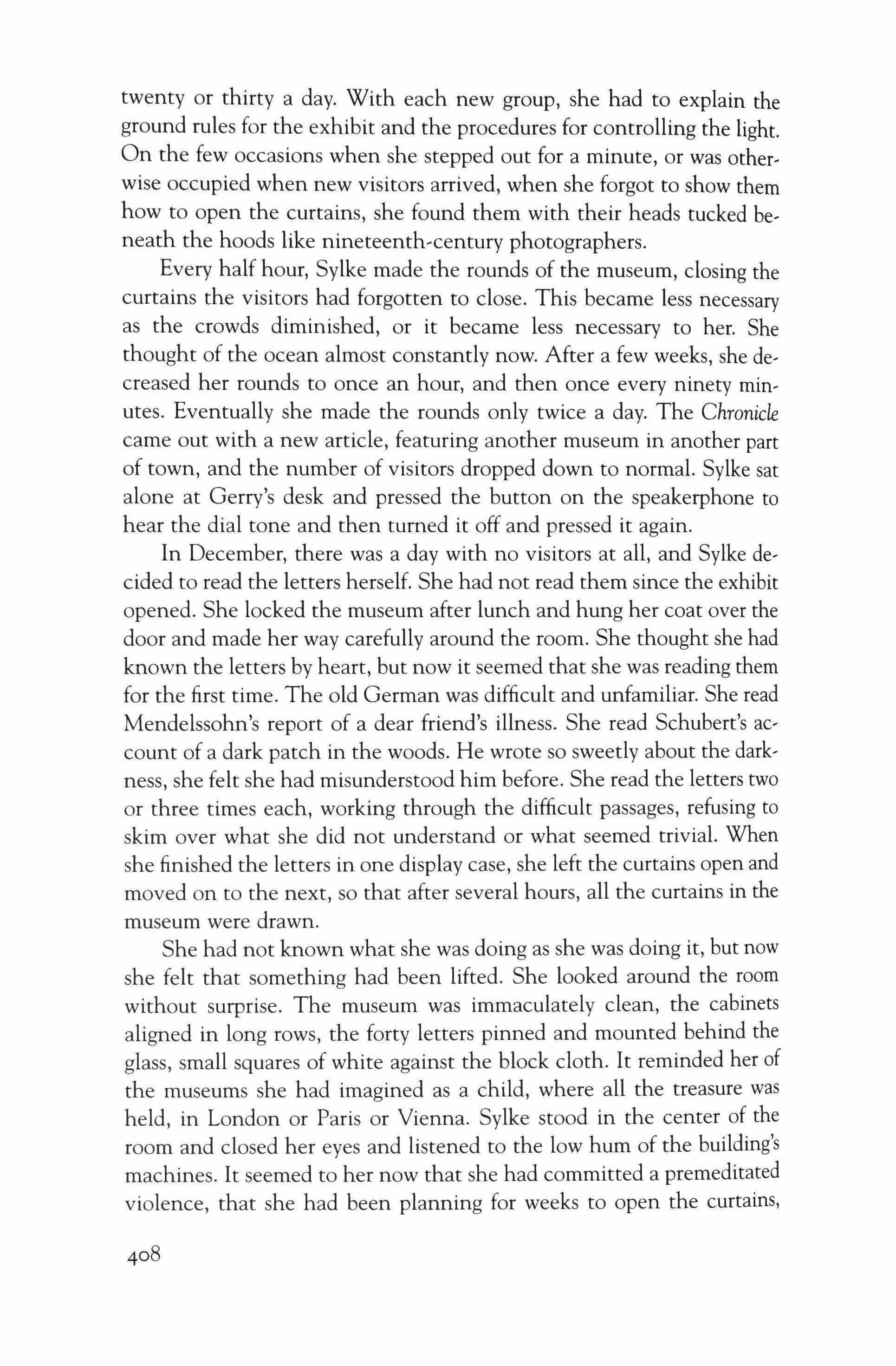
twenty or thirty a day. With each new group, she had to explain the ground rules for the exhibit and the procedures for controlling the light. On the few occasions when she stepped out for a minute, or was otherwise occupied when new visitors arrived, when she forgot to show them how to open the curtains, she found them with their heads tucked beneath the hoods like nineteenth-century photographers.
Every half hour, Sylke made the rounds of the museum, closing the curtains the visitors had forgotten to close. This became less necessary as the crowds diminished, or it became less necessary to her. She thought of the ocean almost constantly now. After a few weeks, she decreased her rounds to once an hour, and then once every ninety minutes. Eventually she made the rounds only twice a day. The Chronicle came out with a new article, featuring another museum in another part of town, and the number of visitors dropped down to normal. Sylke sat alone at Gerry's desk and pressed the button on the speakerphone to hear the dial tone and then turned it off and pressed it again.
In December, there was a day with no visitors at all, and Sylke decided to read the letters herself. She had not read them since the exhibit opened. She locked the museum after lunch and hung her coat over the door and made her way carefully around the room. She thought she had known the letters by heart, but now it seemed that she was reading them for the first time. The old German was difficult and unfamiliar. She read Mendelssohn's report of a dear friend's illness. She read Schubert's account of a dark patch in the woods. He wrote so sweetly about the darkness, she felt she had misunderstood him before. She read the letters two or three times each, working through the difficult passages, refusing to skim over what she did not understand or what seemed trivial. When she finished the letters in one display case, she left the curtains open and moved on to the next, so that after several hours, all the curtains in the museum were drawn.
She had not known what she was doing as she was doing it, but now she felt that something had been lifted. She looked around the room without surprise. The museum was immaculately clean, the cabinets aligned in long rows, the forty letters pinned and mounted behind the glass, small squares of white against the block cloth. It reminded her of the museums she had imagined as a child, where all the treasure was held, in London or Paris or Vienna. Sylke stood in the center of the room and closed her eyes and listened to the low hum of the building's machines. It seemed to her now that she had committed a premeditated violence, that she had been planning for weeks to open the curtains,
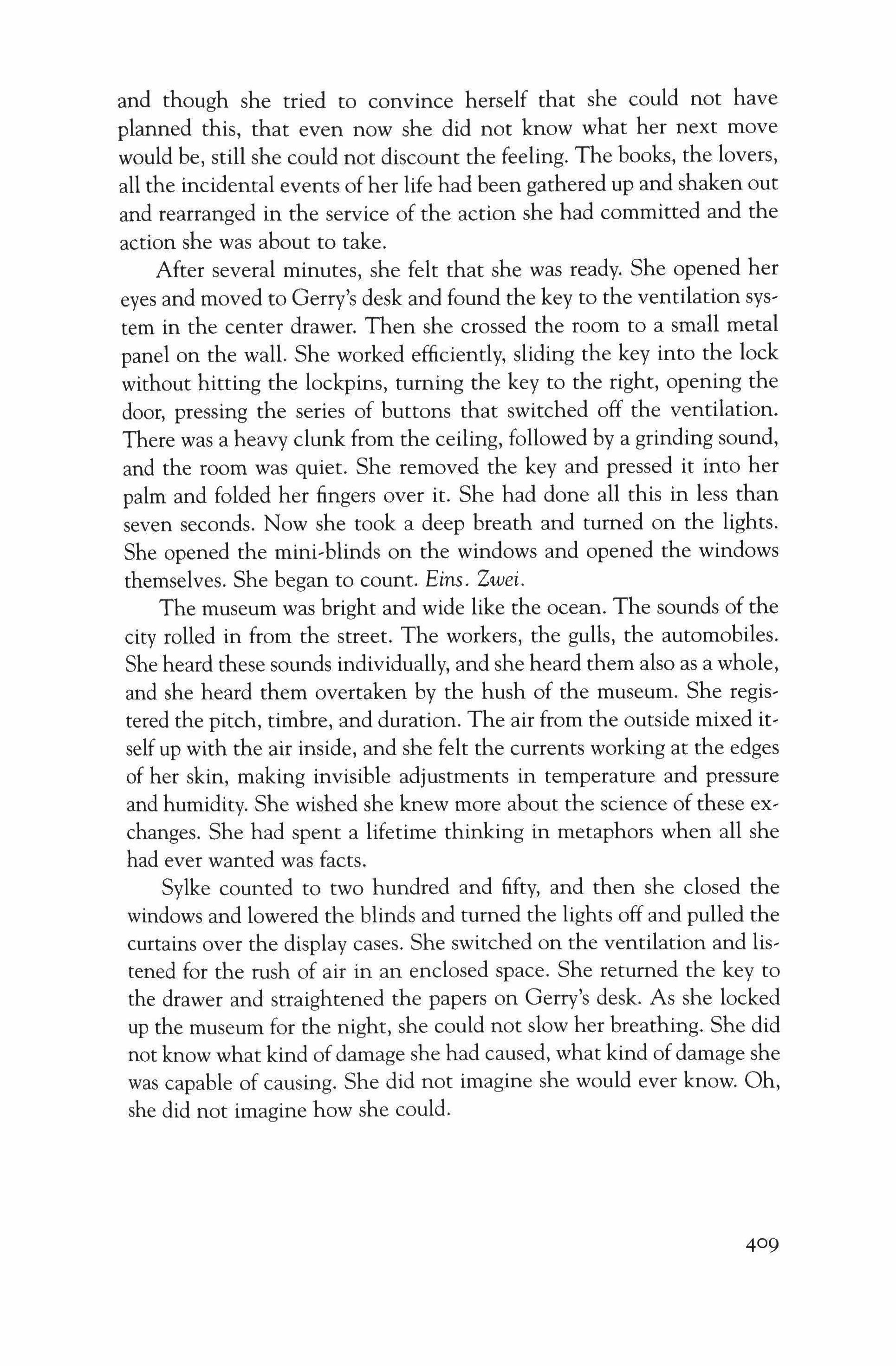
and though she tried to convince herself that she could not have planned this, that even now she did not know what her next move would be, still she could not discount the feeling. The books, the lovers, all the incidental events ofher life had been gathered up and shaken out and rearranged in the service of the action she had committed and the action she was about to take.
After several minutes, she felt that she was ready. She opened her eyes and moved to Gerry's desk and found the key to the ventilation systern in the center drawer. Then she crossed the room to a small metal panel on the wall. She worked efficiently, sliding the key into the lock without hitting the lockpins, turning the key to the right, opening the door, pressing the series of buttons that switched off the ventilation. There was a heavy clunk from the ceiling, followed by a grinding sound, and the room was quiet. She removed the key and pressed it into her palm and folded her fingers over it. She had done all this in less than seven seconds. Now she took a deep breath and turned on the lights. She opened the mini-blinds on the windows and opened the windows themselves. She began to count. Eins. Zwei.
The museum was bright and wide like the ocean. The sounds of the city rolled in from the street. The workers, the gulls, the automobiles. She heard these sounds individually, and she heard them also as a whole, and she heard them overtaken by the hush of the museum. She registered the pitch, timbre, and duration. The air from the outside mixed ttself up with the air inside, and she felt the currents working at the edges of her skin, making invisible adjustments in temperature and pressure and humidity. She wished she knew more about the science of these ex� changes. She had spent a lifetime thinking in metaphors when all she had ever wanted was facts.
Sylke counted to two hundred and fifty, and then she closed the windows and lowered the blinds and turned the lights off and pulled the curtains over the display cases. She switched on the ventilation and listened for the rush of air in an enclosed space. She returned the key to the drawer and straightened the papers on Gerry's desk. As she locked up the museum for the night, she could not slow her breathing. She did not know what kind of damage she had caused, what kind of damage she was capable of causing. She did not imagine she would ever know. Oh, she did not imagine how she could.
Cecilia Pinto
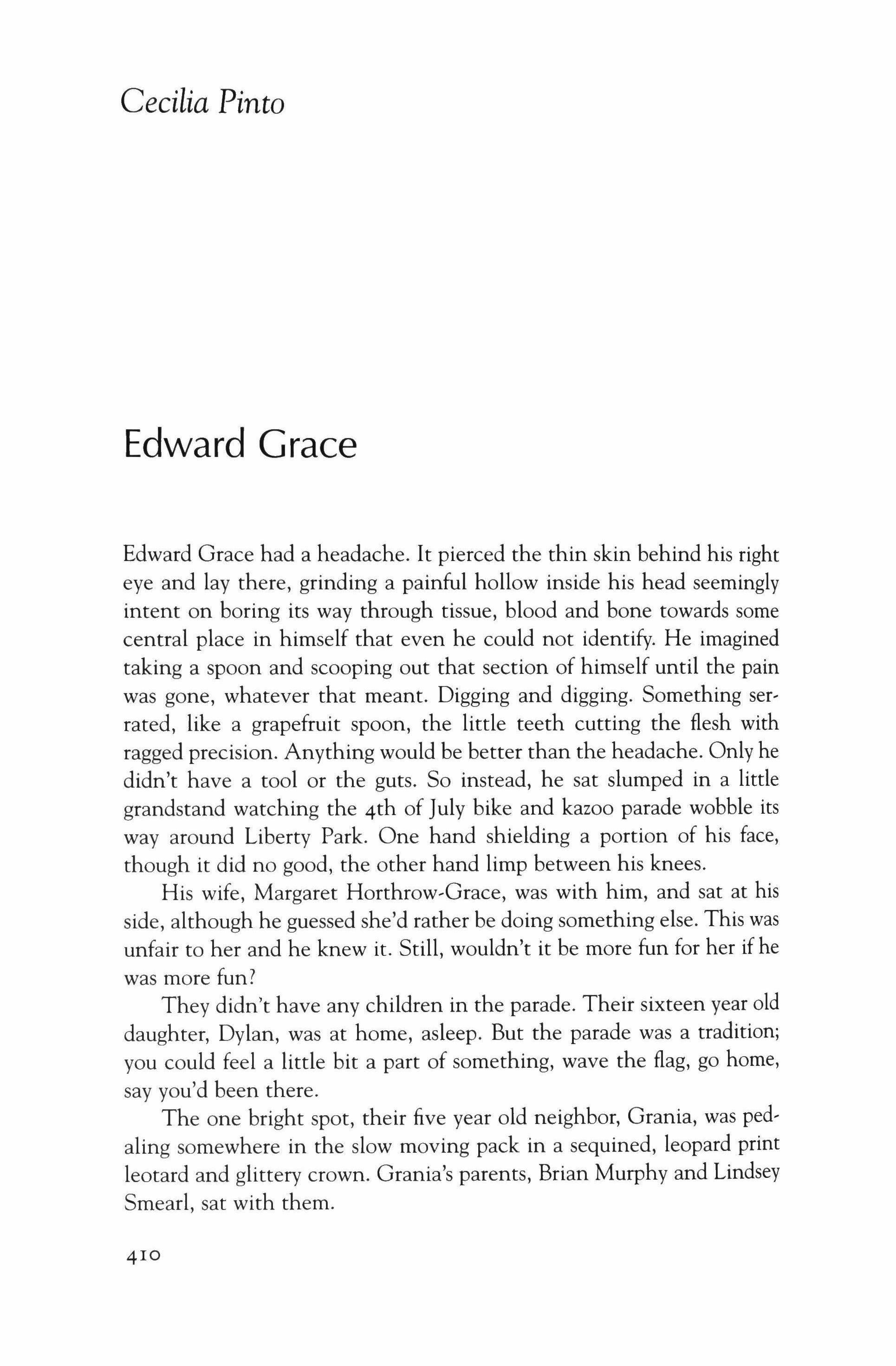
Edward Grace
Edward Grace had a headache. It pierced the thin skin behind his right eye and lay there, grinding a painful hollow inside his head seemingly intent on boring its way through tissue, blood and bone towards some central place in himself that even he could not identify. He imagined taking a spoon and scooping out that section of himself until the pain was gone, whatever that meant. Digging and digging. Something serrated, like a grapefruit spoon, the little teeth cutting the flesh with ragged precision. Anything would be better than the headache. Only he didn't have a tool or the guts. So instead, he sat slumped in a little grandstand watching the 4th of July bike and kazoo parade wobble its way around Liberty Park. One hand shielding a portion of his face, though it did no good, the other hand limp between his knees.
His wife, Margaret Horthrow-Grace, was with him, and sat at his side, although he guessed she'd rather be doing something else. This was unfair to her and he knew it. Still, wouldn't it be more fun for her if he was more fun?
They didn't have any children in the parade. Their sixteen year old daughter, Dylan, was at home, asleep. But the parade was a tradition; you could feel a little bit a part of something, wave the flag, go home, say you'd been there.
The one bright spot, their five year old neighbor, Grania, was pedaling somewhere in the slow moving pack in a sequined, leopard print leotard and glittery crown. Grania's parents, Brian Murphy and Lindsey Smead, sat with them. 410
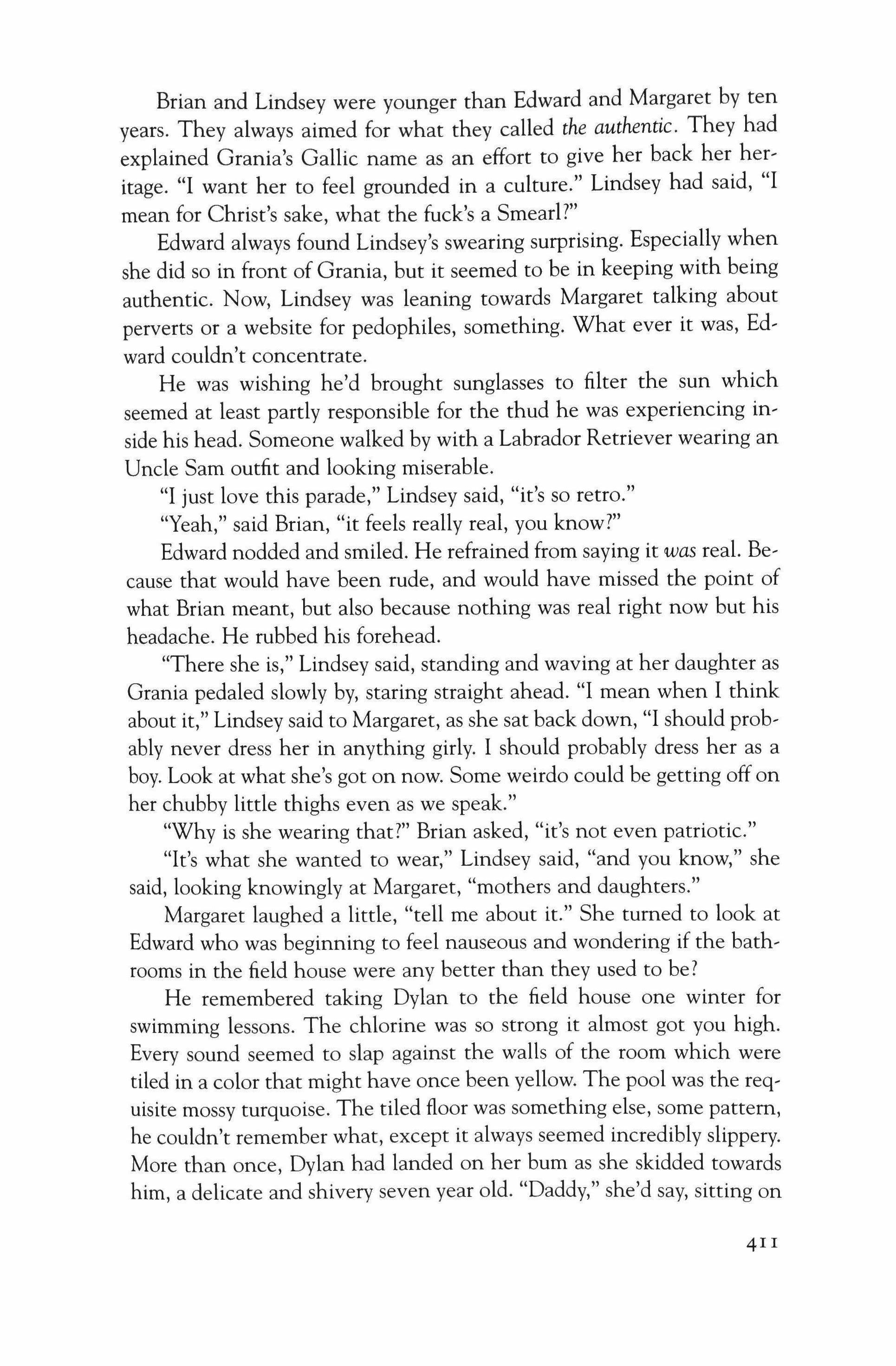
Brian and Lindsey were younger than Edward and Margaret by ten years. They always aimed for what they called the authentic. They had explained Grania's Gallic name as an effort to give her back her her, itage. "I want her to feel grounded in a culture." Lindsey had said, "I mean for Christ's sake, what the fuck's a Smearl?"
Edward always found Lindsey's swearing surprising. Especially when she did so in front of Grania, but it seemed to be in keeping with being authentic. Now, Lindsey was leaning towards Margaret talking about perverts or a website for pedophiles, something. What ever it was, Ed, ward couldn't concentrate.
He was wishing he'd brought sunglasses to filter the sun which seemed at least partly responsible for the thud he was experiencing in' side his head. Someone walked by with a Labrador Retriever wearing an Uncle Sam outfit and looking miserable.
"I just love this parade," Lindsey said, "it's so retro."
"Yeah," said Brian, "it feels really real, you know?"
Edward nodded and smiled. He refrained from saying it was real. Be, cause that would have been rude, and would have missed the point of what Brian meant, but also because nothing was real right now but his headache. He rubbed his forehead.
"There she is," Lindsey said, standing and waving at her daughter as Grania pedaled slowly by, staring straight ahead. "I mean when I think about it," Lindsey said to Margaret, as she sat back down, "I should probably never dress her in anything girly. I should probably dress her as a boy. Look at what she's got on now. Some weirdo could be getting off on her chubby little thighs even as we speak."
"Why is she wearing that?" Brian asked, "it's not even patriotic."
"It's what she wanted to wear," Lindsey said, "and you know," she said, looking knowingly at Margaret, "mothers and daughters."
Margaret laughed a little, "tell me about it." She turned to look at Edward who was beginning to feel nauseous and wondering if the bath, rooms in the field house were any better than they used to be?
He remembered taking Dylan to the field house one winter for swimming lessons. The chlorine was so strong it almost got you high. Every sound seemed to slap against the walls of the room which were tiled in a color that might have once been yellow. The pool was the requisite mossy turquoise. The tiled floor was something else, some pattern, he couldn't remember what, except it always seemed incredibly slippery. More than once, Dylan had landed on her bum as she skidded towards him, a delicate and shivery seven year old. "Daddy," she'd say, sitting on
411
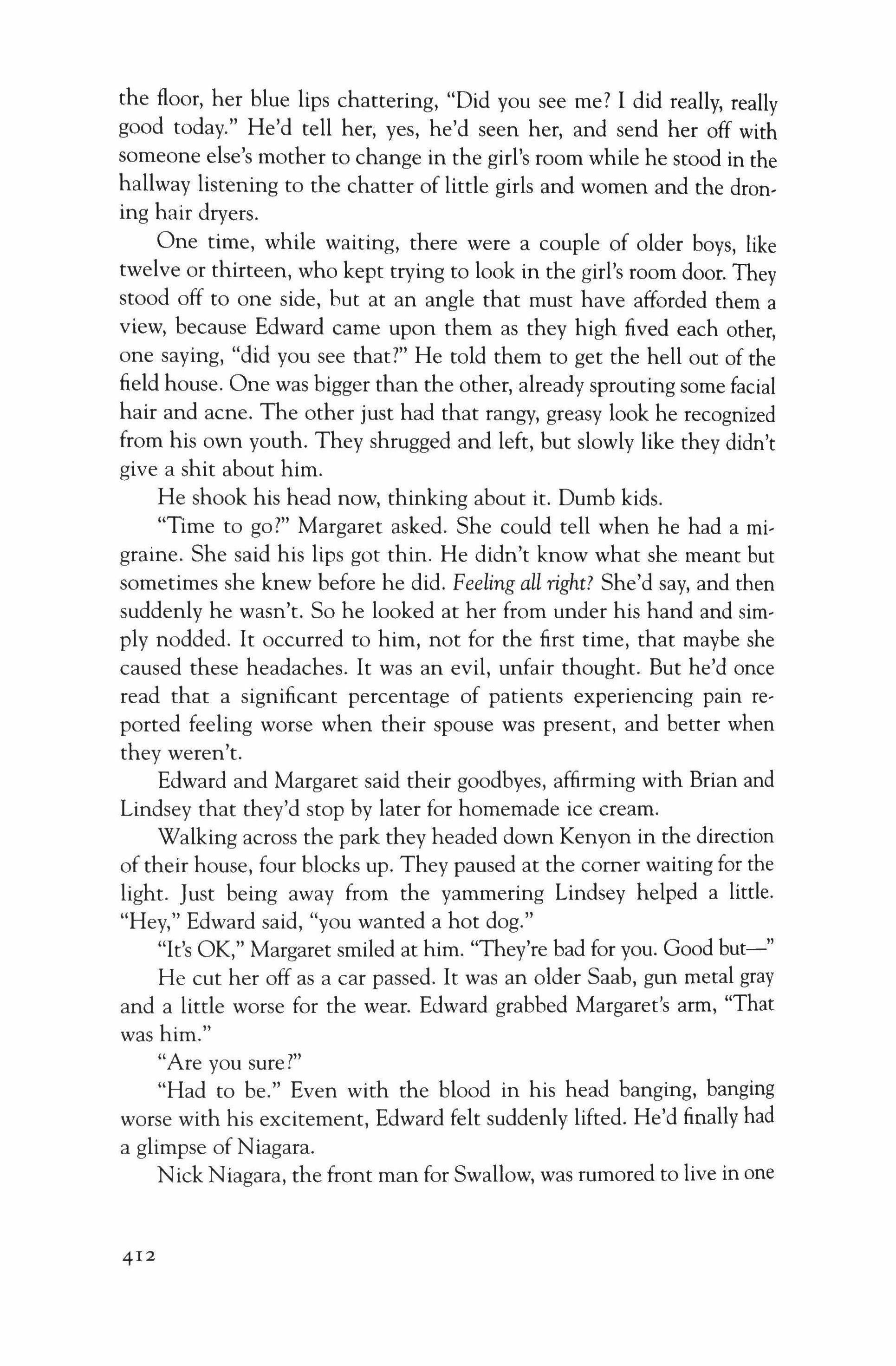
the floor, her blue lips chattering, "Did you see me? I did really, really good today." He'd tell her, yes, he'd seen her, and send her off with someone else's mother to change in the girl's room while he stood in the hallway listening to the chatter of little girls and women and the droning hair dryers.
One time, while waiting, there were a couple of older boys, like twelve or thirteen, who kept trying to look in the girl's room door. They stood off to one side, but at an angle that must have afforded them a view, because Edward came upon them as they high fived each other, one saying, "did you see that?" He told them to get the hell out of the field house. One was bigger than the other, already sprouting some facial hair and acne. The other just had that rangy, greasy look he recognized from his own youth. They shrugged and left, but slowly like they didn't give a shit about him.
He shook his head now, thinking about it. Dumb kids.
"Time to go?" Margaret asked. She could tell when he had a migraine. She said his lips got thin. He didn't know what she meant but sometimes she knew before he did. Feeling all right? She'd say, and then suddenly he wasn't. So he looked at her from under his hand and simply nodded. It occurred to him, not for the first time, that maybe she caused these headaches. It was an evil, unfair thought. But he'd once read that a significant percentage of patients experiencing pain reported feeling worse when their spouse was present, and better when they weren't.
Edward and Margaret said their goodbyes, affirming with Brian and Lindsey that they'd stop by later for homemade ice cream.
Walking across the park they headed down Kenyon in the direction of their house, four blocks up. They paused at the comer waiting for the light. Just being away from the yammering Lindsey helped a little. "Hey," Edward said, "you wanted a hot dog."
"It's OK," Margaret smiled at him. "They're bad for you. Good but-"
He cut her off as a car passed. It was an older Saab, gun metal gray and a little worse for the wear. Edward grabbed Margaret's arm, "That was him."
"Are you sure?"
"Had to be." Even with the blood in his head banging, banging worse with his excitement, Edward felt suddenly lifted. He'd finally had a glimpse of Niagara.
Nick Niagara, the front man for Swallow, was rumored to live in one
412
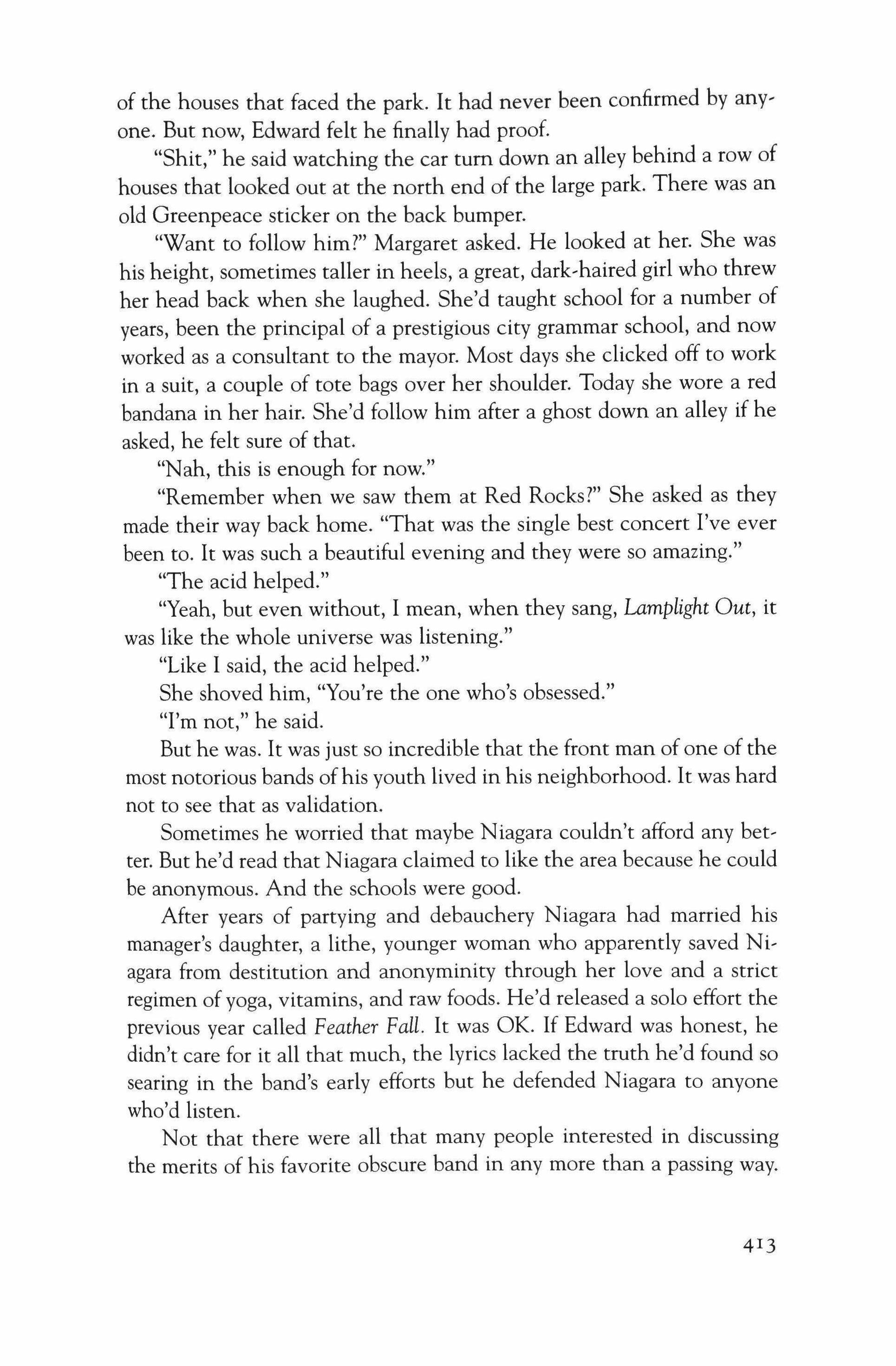
of the houses that faced the park. It had never been confirmed by any' one. But now, Edward felt he finally had proof.
"Shit," he said watching the car tum down an alley behind a row of houses that looked out at the north end of the large park. There was an old Greenpeace sticker on the back bumper.
"Want to follow him?" Margaret asked. He looked at her. She was his height, sometimes taller in heels, a great, dark,haired girl who threw her head back when she laughed. She'd taught school for a number of years, been the principal of a prestigious city grammar school, and now worked as a consultant to the mayor. Most days she clicked off to work in a suit, a couple of tote bags over her shoulder. Today she wore a red bandana in her hair. She'd follow him after a ghost down an alley if he asked, he felt sure of that.
"Nah, this is enough for now."
"Remember when we saw them at Red Rocks?" She asked as they made their way back home. "That was the single best concert I've ever been to. It was such a beautiful evening and they were so amazing."
"The acid helped."
"Yeah, but even without, I mean, when they sang, Lamplight Out, it was like the whole universe was listening."
"Like I said, the acid helped."
She shoved him, "You're the one who's obsessed."
"I'm not," he said.
But he was. It was just so incredible that the front man of one of the most notorious bands ofhis youth lived in his neighborhood. It was hard not to see that as validation.
Sometimes he worried that maybe Niagara couldn't afford any bet' ter. But he'd read that Niagara claimed to like the area because he could be anonymous. And the schools were good.
After years of partying and debauchery Niagara had married his manager's daughter, a lithe, younger woman who apparently saved Niagara from destitution and anonyminity through her love and a strict regimen of yoga, vitamins, and raw foods. He'd released a solo effort the previous year called Feather Fall. It was OK. If Edward was honest, he didn't care for it all that much, the lyrics lacked the truth he'd found so searing in the band's early efforts but he defended Niagara to anyone who'd listen.
Not that there were all that many people interested in discussing the merits of his favorite obscure band in any more than a passing way.
413
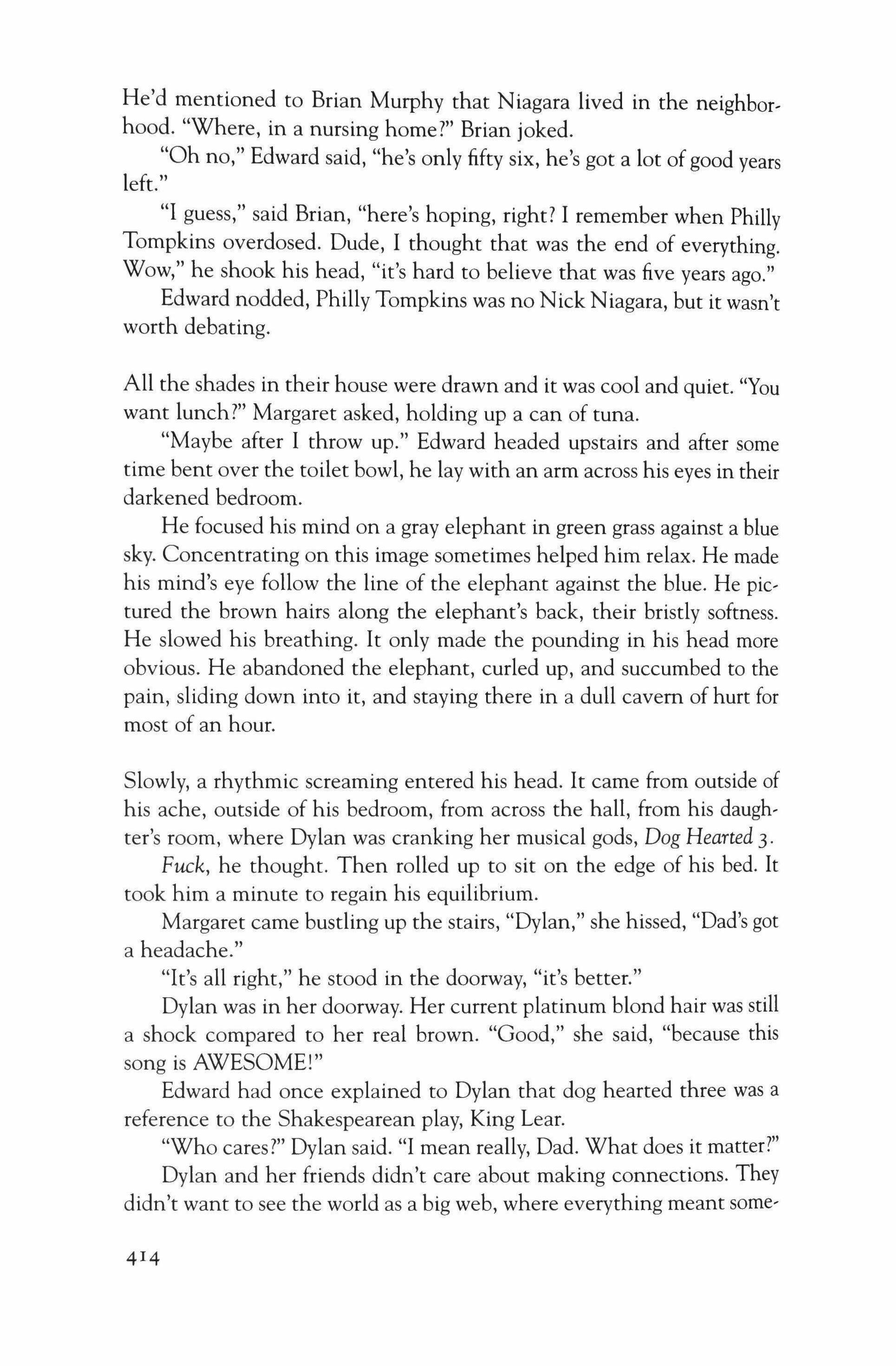
He'd mentioned to Brian Murphy that Niagara lived in the neighborhood. "Where, in a nursing home?" Brian joked.
"Oh no," Edward said, "he's only fifty six, he's got a lot of good years left."
"I guess," said Brian, "here's hoping, right? I remember when Phillv Tompkins overdosed. Dude, I thought that was the end of everything. Wow," he shook his head, "it's hard to believe that was five years ago."
Edward nodded, Philly Tompkins was no Nick Niagara, but it wasn't worth debating.
All the shades in their house were drawn and it was cool and quiet. "You want lunch?" Margaret asked, holding up a can of tuna.
"Maybe after I throw up." Edward headed upstairs and after some time bent over the toilet bowl, he lay with an arm across his eyes in their darkened bedroom.
He focused his mind on a gray elephant in green grass against a blue sky. Concentrating on this image sometimes helped him relax. He made his mind's eye follow the line of the elephant against the blue. He pictured the brown hairs along the elephant's back, their bristly softness. He slowed his breathing. It only made the pounding in his head more obvious. He abandoned the elephant, curled up, and succumbed to the pain, sliding down into it, and staying there in a dull cavern of hurt for most of an hour.
Slowly, a rhythmic screaming entered his head. It came from outside of his ache, outside of his bedroom, from across the hall, from his daughter's room, where Dylan was cranking her musical gods, Dog Hearted 3.
Fuck, he thought. Then rolled up to sit on the edge of his bed. It took him a minute to regain his equilibrium.
Margaret came bustling up the stairs, "Dylan," she hissed, "Dad's got a headache."
"It's all right," he stood in the doorway, "it's better."
Dylan was in her doorway. Her current platinum blond hair was still a shock compared to her real brown. "Good," she said, "because this song is AWESOME!"
Edward had once explained to Dylan that dog hearted three was a reference to the Shakespearean play, King Lear.
"Who cares?" Dylan said. "I mean really, Dad. What does it matter?"
Dylan and her friends didn't care about making connections. They didn't want to see the world as a big web, where everything meant some-
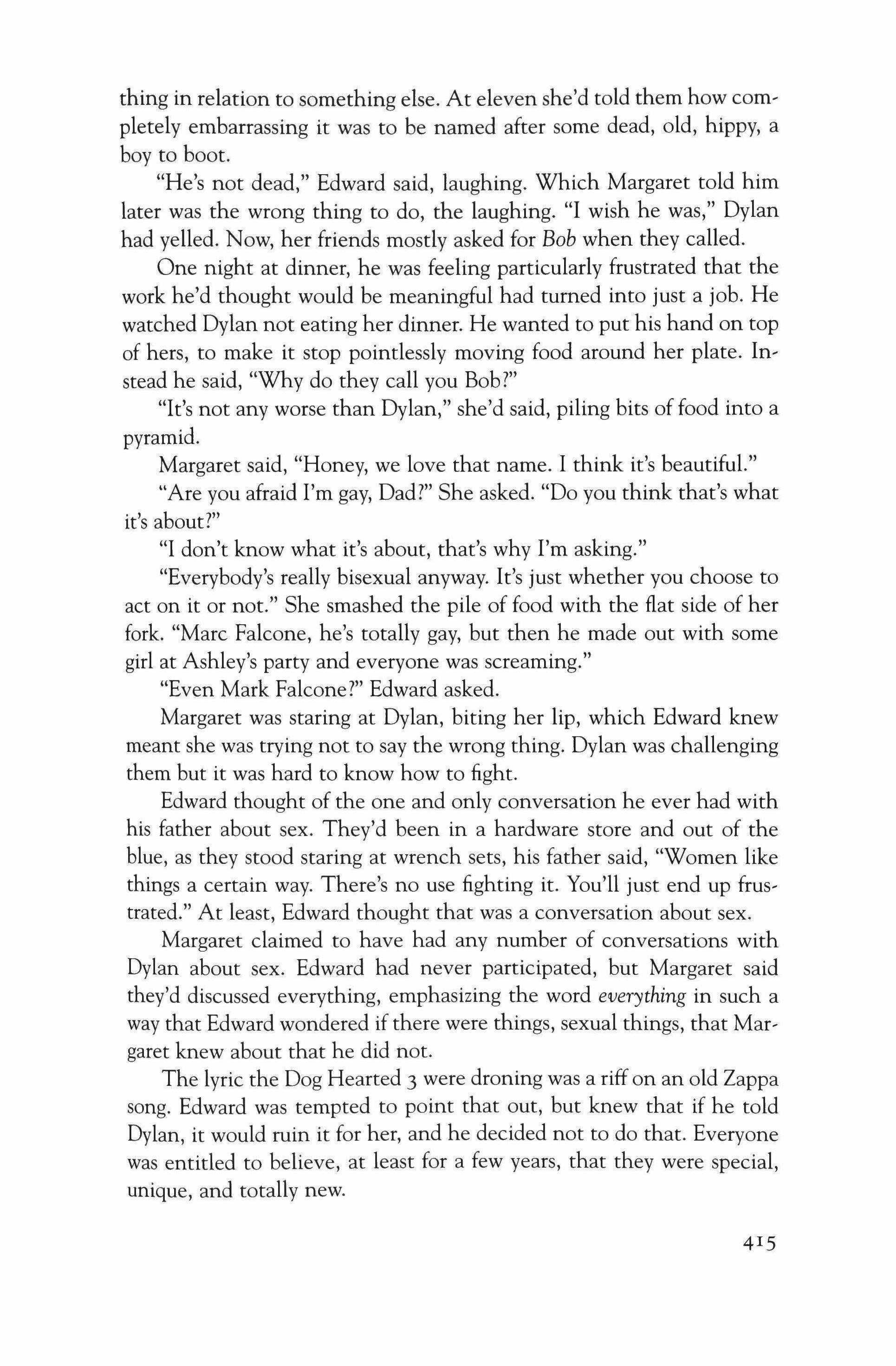
thing in relation to something else. At eleven she'd told them how com' pletely embarrassing it was to be named after some dead, old, hippy, a boy to boot.
"He's not dead," Edward said, laughing. Which Margaret told him later was the wrong thing to do, the laughing. "I wish he was," Dylan had yelled. Now, her friends mostly asked for Bob when they called.
One night at dinner, he was feeling particularly frustrated that the work he'd thought would be meaningful had turned into just a job. He watched Dylan not eating her dinner. He wanted to put his hand on top of hers, to make it stop pointlessly moving food around her plate. In, stead he said, "Why do they call you Bob?"
"It's not any worse than Dylan," she'd said, piling bits of food into a pyramid.
Margaret said, "Honey, we love that name. I think it's beautiful."
"Are you afraid I'm gay, Dad?" She asked. "Do you think that's what it's about?"
"I don't know what it's about, that's why I'm asking."
"Everybody's really bisexual anyway. It's just whether you choose to act on it or not." She smashed the pile of food with the flat side of her fork. "Marc Falcone, he's totally gay, but then he made out with some girl at Ashley's party and everyone was screaming."
"Even Mark Falcone?" Edward asked.
Margaret was staring at Dylan, biting her lip, which Edward knew meant she was trying not to say the wrong thing. Dylan was challenging them but it was hard to know how to fight.
Edward thought of the one and only conversation he ever had with his father about sex. They'd been in a hardware store and out of the blue, as they stood staring at wrench sets, his father said, "Women like things a certain way. There's no use fighting it. You'll just end up frustrated." At least, Edward thought that was a conversation about sex.
Margaret claimed to have had any number of conversations with Dylan about sex. Edward had never participated, but Margaret said they'd discussed everything, emphasizing the word everything in such a way that Edward wondered if there were things, sexual things, that Mar, garet knew about that he did not.
The lyric the Dog Hearted 3 were droning was a riff on an old Zappa song. Edward was tempted to point that out, but knew that if he told Dylan, it would ruin it for her, and he decided not to do that. Everyone was entitled to believe, at least for a few years, that they were special, unique, and totally new.
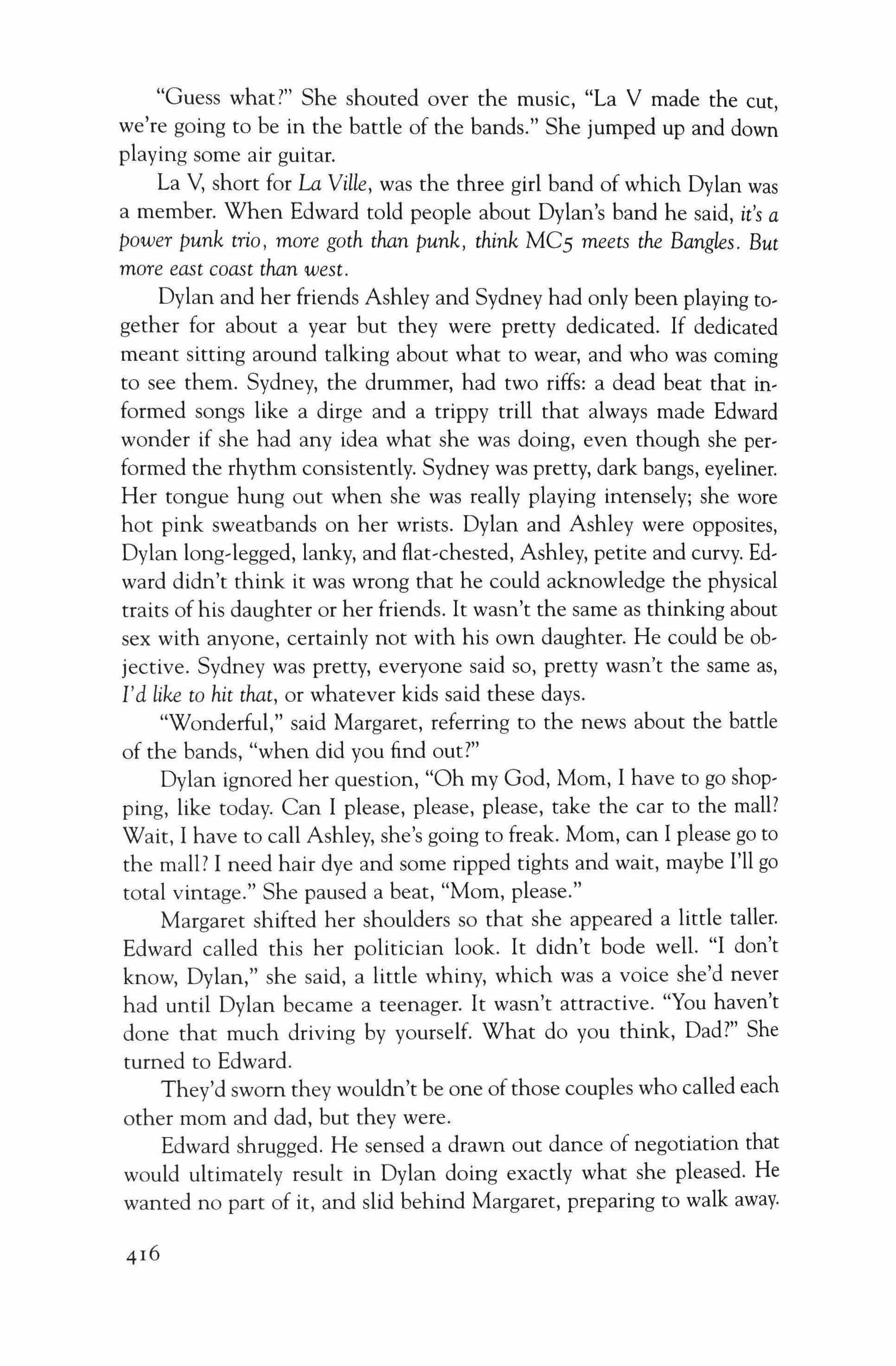
"Guess what?" She shouted over the music, "La V made the cut we're going to be in the battle of the bands." She jumped up and down playing some air guitar.
La V, short for La Ville, was the three girl band of which Dylan was a member. When Edward told people about Dylan's band he said, it's a power punk trio, more goth than punk, think MCS meets the Bangles. But more east coast than west.
Dylan and her friends Ashley and Sydney had only been playing together for about a year but they were pretty dedicated. If dedicated meant sitting around talking about what to wear, and who was coming to see them. Sydney, the drummer, had two riffs: a dead beat that informed songs like a dirge and a trippy trill that always made Edward wonder if she had any idea what she was doing, even though she performed the rhythm consistently. Sydney was pretty, dark bangs, eyeliner. Her tongue hung out when she was really playing intensely; she wore hot pink sweatbands on her wrists. Dylan and Ashley were opposites, Dylan long-legged, lanky, and flat-chested, Ashley, petite and curvy. Edward didn't think it was wrong that he could acknowledge the physical traits of his daughter or her friends. It wasn't the same as thinking about sex with anyone, certainly not with his own daughter. He could be objective. Sydney was pretty, everyone said so, pretty wasn't the same as, 1'd like to hit that, or whatever kids said these days.
"Wonderful," said Margaret, referring to the news about the battle of the bands, "when did you find out?"
Dylan ignored her question, "Oh my God, Mom, I have to go shopping, like today. Can I please, please, please, take the car to the mall? Wait, I have to call Ashley, she's going to freak. Mom, can I please go to the mall? I need hair dye and some ripped tights and wait, maybe I'll go total vintage." She paused a beat, "Mom, please."
Margaret shifted her shoulders so that she appeared a little taller. Edward called this her politician look. It didn't bode well. "I don't know, Dylan," she said, a little whiny, which was a voice she'd never had until Dylan became a teenager. It wasn't attractive. "You haven't done that much driving by yourself. What do you think, Dad?" She turned to Edward.
They'd sworn they wouldn't be one of those couples who called each other mom and dad, but they were.
Edward shrugged. He sensed a drawn out dance of negotiation that would ultimately result in Dylan doing exactly what she pleased. He wanted no part of it, and slid behind Margaret, preparing to walk away.
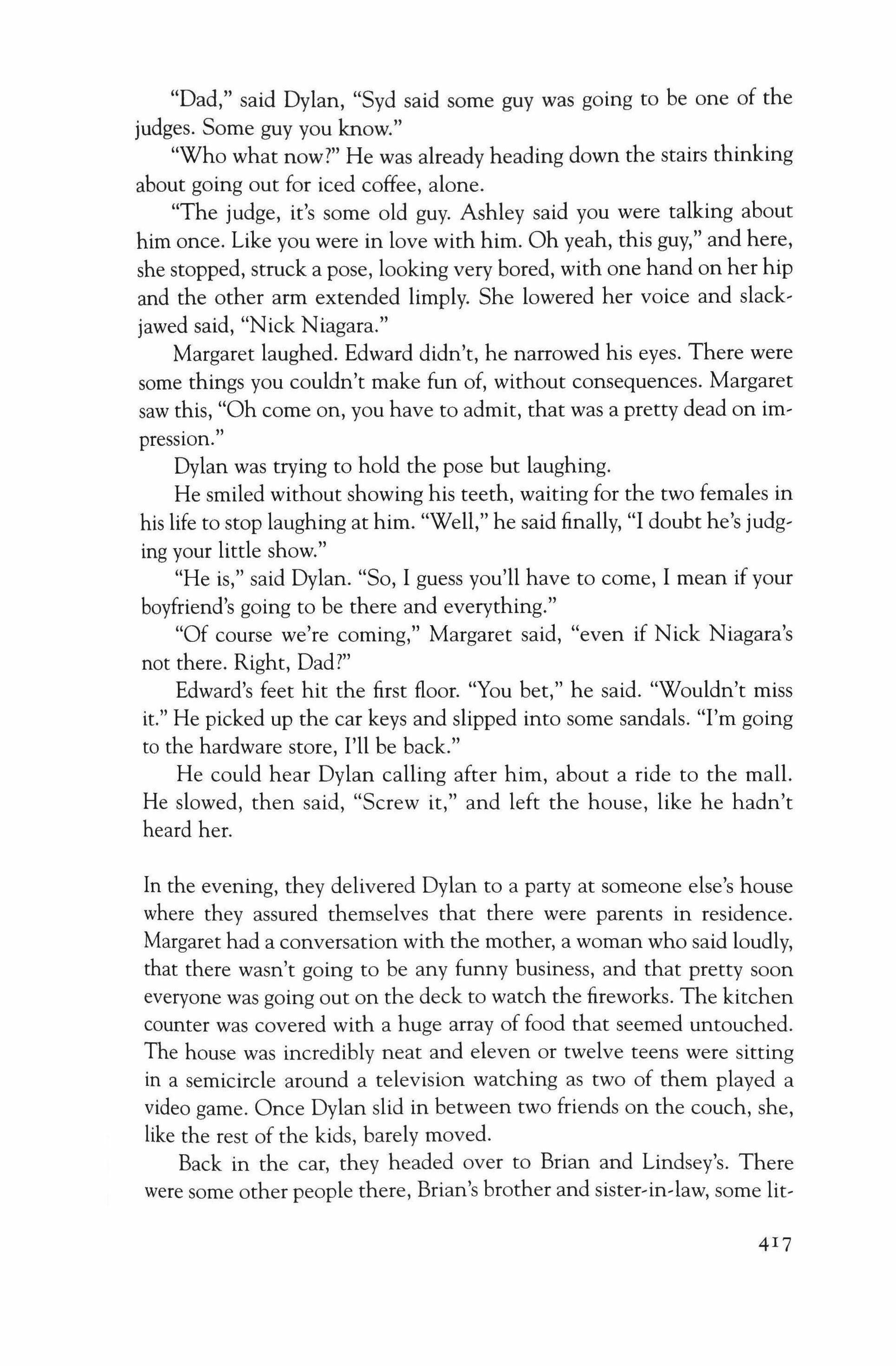
"Dad," said Dylan, "Syd said some guy was going to be one of the judges. Some guy you know."
"Who what now?" He was already heading down the stairs thinking about going out for iced coffee, alone.
"The judge, it's some old guy. Ashley said you were talking about him once. Like you were in love with him. Oh yeah, this guy," and here, she stopped, struck a pose, looking very bored, with one hand on her hip and the other arm extended limply. She lowered her voice and slackjawed said, "Nick Niagara."
Margaret laughed. Edward didn't, he narrowed his eyes. There were some things you couldn't make fun of, without consequences. Margaret saw this, "Oh come on, you have to admit, that was a pretty dead on im" pression.
Dylan was trying to hold the pose but laughing.
He smiled without showing his teeth, waiting for the two females in his life to stop laughing at him. "Well," he said finally, "I doubt he's judging your little show."
"He is," said Dylan. "So, I guess you'll have to come, I mean if your boyfriend's going to be there and everything."
"Of course we're coming," Margaret said, "even if Nick Niagara's not there. Right, Dad?"
Edward's feet hit the first floor. "You bet," he said. "Wouldn't miss it." He picked up the car keys and slipped into some sandals. "I'm going to the hardware store, I'll be back."
He could hear Dylan calling after him, about a ride to the mall. He slowed, then said, "Screw it," and left the house, like he hadn't heard her.
In the evening, they delivered Dylan to a party at someone else's house where they assured themselves that there were parents in residence. Margaret had a conversation with the mother, a woman who said loudly, that there wasn't going to be any funny business, and that pretty soon everyone was going out on the deck to watch the fireworks. The kitchen counter was covered with a huge array of food that seemed untouched. The house was incredibly neat and eleven or twelve teens were sitting in a semicircle around a television watching as two of them played a video game. Once Dylan slid in between two friends on the couch, she, like the rest of the kids, barely moved.
Back in the car, they headed over to Brian and Lindsey's. There were some other people there, Brian's brother and sister-in-law, some lit-
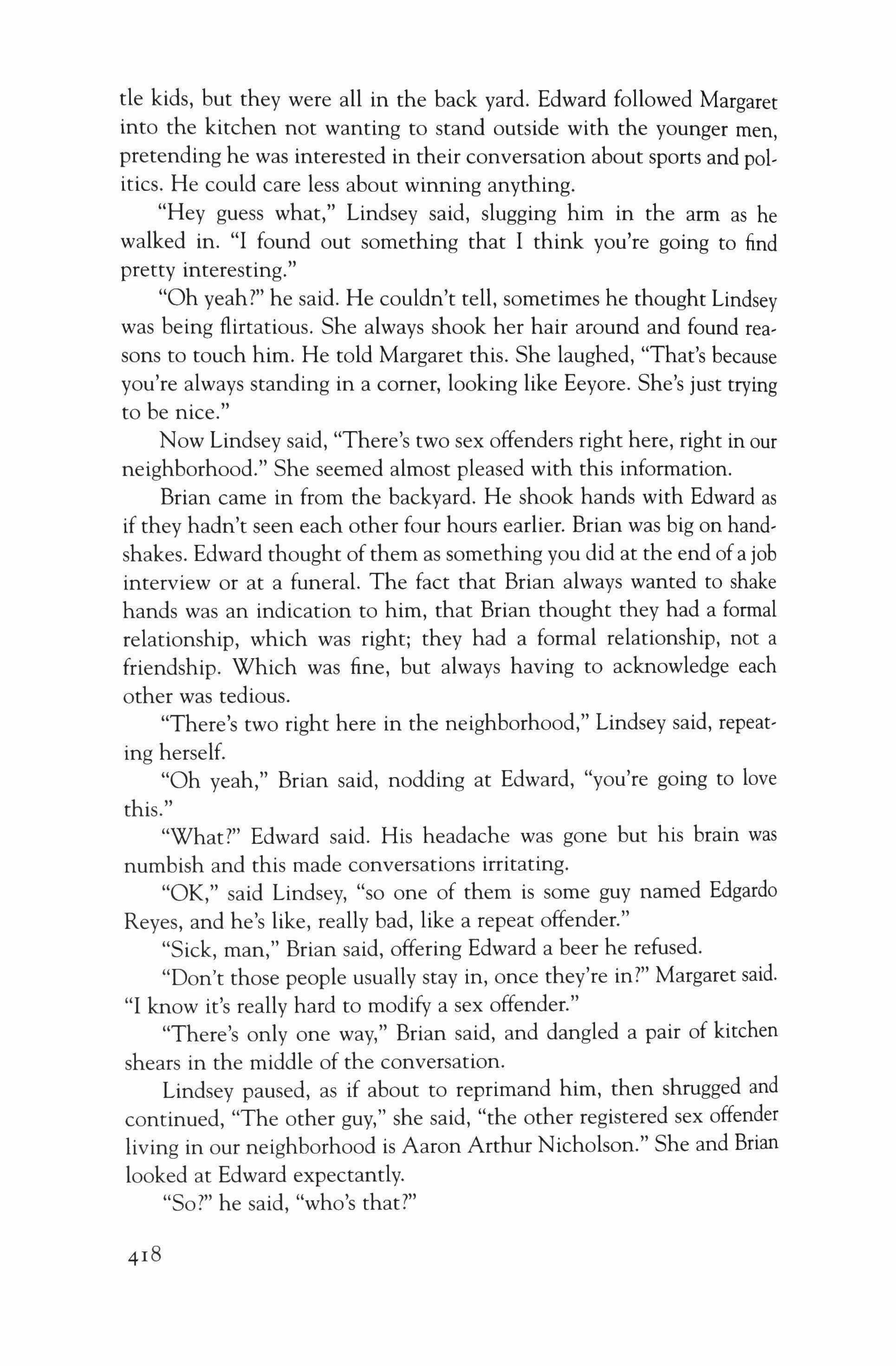
tle kids, but they were all in the back yard. Edward followed Margaret into the kitchen not wanting to stand outside with the younger men, pretending he was interested in their conversation about sports and politics. He could care less about winning anything.
"Hey guess what," Lindsey said, slugging him in the arm as he walked in. "I found out something that I think you're going to find pretty interesting."
"Oh yeah?" he said. He couldn't tell, sometimes he thought Lindsey was being flirtatious. She always shook her hair around and found reasons to touch him. He told Margaret this. She laughed, "That's because you're always standing in a comer, looking like Eeyore. She's just trying to be nice."
Now Lindsey said, "There's two sex offenders right here, right in our neighborhood." She seemed almost pleased with this information.
Brian came in from the backyard. He shook hands with Edward as if they hadn't seen each other four hours earlier. Brian was big on handshakes. Edward thought of them as something you did at the end of a job interview or at a funeral. The fact that Brian always wanted to shake hands was an indication to him, that Brian thought they had a formal relationship, which was right; they had a formal relationship, not a friendship. Which was fine, but always having to acknowledge each other was tedious.
"There's two right here in the neighborhood," Lindsey said, repeating herself.
"Oh yeah," Brian said, nodding at Edward, "you're going to love this."
"What?" Edward said. His headache was gone but his brain was numbish and this made conversations irritating.
"OK," said Lindsey, "so one of them is some guy named Edgardo Reyes, and he's like, really bad, like a repeat offender."
"Sick, man," Brian said, offering Edward a beer he refused.
"Don't those people usually stay in, once they're in?" Margaret said. "I know it's really hard to modify a sex offender."
"There's only one way," Brian said, and dangled a pair of kitchen shears in the middle of the conversation.
Lindsey paused, as if about to reprimand him, then shrugged and continued, "The other guy," she said, "the other registered sex offender living in our neighborhood is Aaron Arthur Nicholson." She and Brian looked at Edward expectantly.
"So?" he said, "who's that?"

"What?" said Margaret. "Oh my God." She started laughing. Now all three of them were looking at Edward and grinning.
He looked back and shrugged.
Margaret said with an emphasis he didn't understand, "Aaron Arthur Nicholson."
He looked at her and shrugged bigger, raised his open, empty hands and opened his eyes wide to indicate that he didn't get whatever it was he was supposed to get.
Orania ran in the house, interrupting the conversation, wanting a Popsicle. A tedious argument ensued between Orania and Lindsey with Lindsey giving a reasoned explanation as to why a Popsicle was an inappropriate food choice at this particular time. Orania kept repeating the word, why, in such a way that indicated to Edward that she wasn't buying the explanation, probably didn't even understand it. Finally, Brian opened the freezer and handed the little girl a Popsicle and sent her back outside.
"Why did you do that?" Lindsey asked. "You always do that, you make me look like the bad guy."
"You are the bad guy," Brian said, shrugging. Edward laughed at this.
"It's true," Brian said. "You're the one who says no, I always say yes." Lindsey opened her mouth, then closed it. Then she said, "we'll talk about this later."
"Wait," said Margaret, "tell Edward who Aaron Arthur Nicholson is."
"Oh right, Aaron Arthur Nicholson," said Lindsey, "is Nick Niagara."
They all looked at him expectantly. Finally, Margaret said, "Did you know that?"
"He can't be a pedophile," Edward said, "we'd have heard about that."
"Statutory rape," Lindsey said nodding knowingly. "Remember, it was a while ago. He was with some chick and it turned out she was fifteen. And he said he'd been tricked. And then they searched his van or whatever, and there were some photos of other girls."
"He never had a van," Edward said, sort of to himself. "And anyway he wasn't ever convicted."
"Oh yes he was. He just didn't serve time." Lindsey said. "Oh right," said Margaret. "All the pictures had lipstick kisses on them. Remember, like maybe someone had been kissing the pictures? "Ew," said Lindsey, "he was wearing lipstick?"
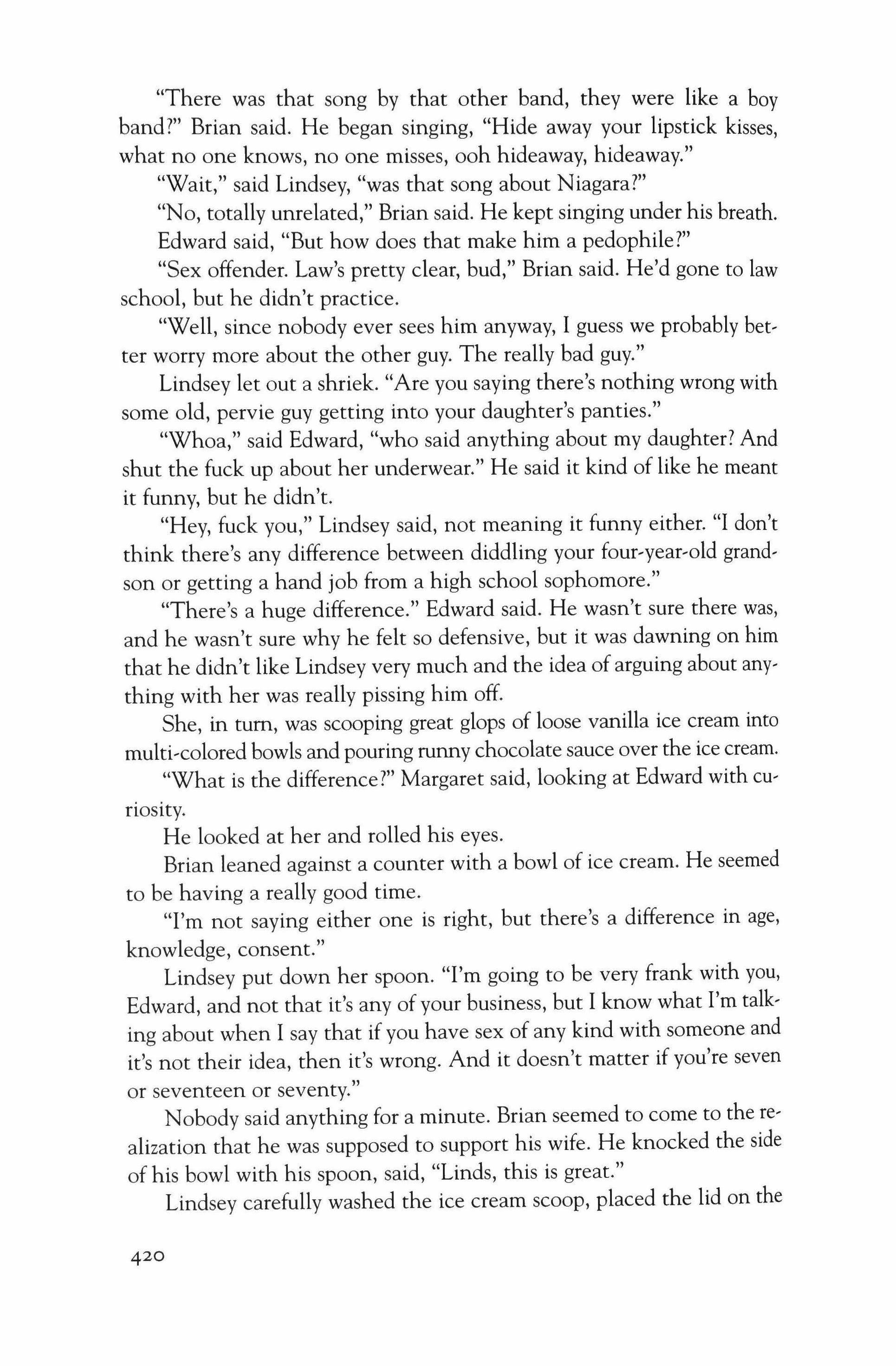
"There was that song by that other band, they were like a boy band?" Brian said. He began singing, "Hide away your lipstick kisses, what no one knows, no one misses, ooh hideaway, hideaway."
"Wait," said Lindsey, "was that song about Niagara?"
"No, totally unrelated," Brian said. He kept singing under his breath. Edward said, "But how does that make him a pedophile?"
"Sex offender. Law's pretty clear, bud," Brian said. He'd gone to law school, but he didn't practice.
"Well, since nobody ever sees him anyway, I guess we probably better worry more about the other guy. The really bad guy."
Lindsey let out a shriek. "Are you saying there's nothing wrong with some old, pervie guy getting into your daughter's panties."
"Whoa," said Edward, "who said anything about my daughter? And shut the fuck up about her underwear." He said it kind of like he meant it funny, but he didn't.
"Hey, fuck you," Lindsey said, not meaning it funny either. "I don't think there's any difference between diddling your four-year-old grandson or getting a hand job from a high school sophomore."
"There's a huge difference." Edward said. He wasn't sure there was, and he wasn't sure why he felt so defensive, but it was dawning on him that he didn't like Lindsey very much and the idea of arguing about anything with her was really pissing him off.
She, in tum, was scooping great glops of loose vanilla ice cream into multi-colored bowls and pouring runny chocolate sauce over the ice cream.
"What is the difference?" Margaret said, looking at Edward with curiosity.
He looked at her and rolled his eyes.
Brian leaned against a counter with a bowl of ice cream. He seemed to be having a really good time.
"I'm not saying either one is right, but there's a difference in age, knowledge, consent."
Lindsey put down her spoon. "I'm going to be very frank with you, Edward, and not that it's any of your business, but I know what I'm talking about when I say that if you have sex of any kind with someone and it's not their idea, then it's wrong. And it doesn't matter if you're seven or seventeen or seventy."
Nobody said anything for a minute. Brian seemed to come to the realization that he was supposed to support his wife. He knocked the side of his bowl with his spoon, said, "Linds, this is great."
Lindsey carefully washed the ice cream scoop, placed the lid on the
420
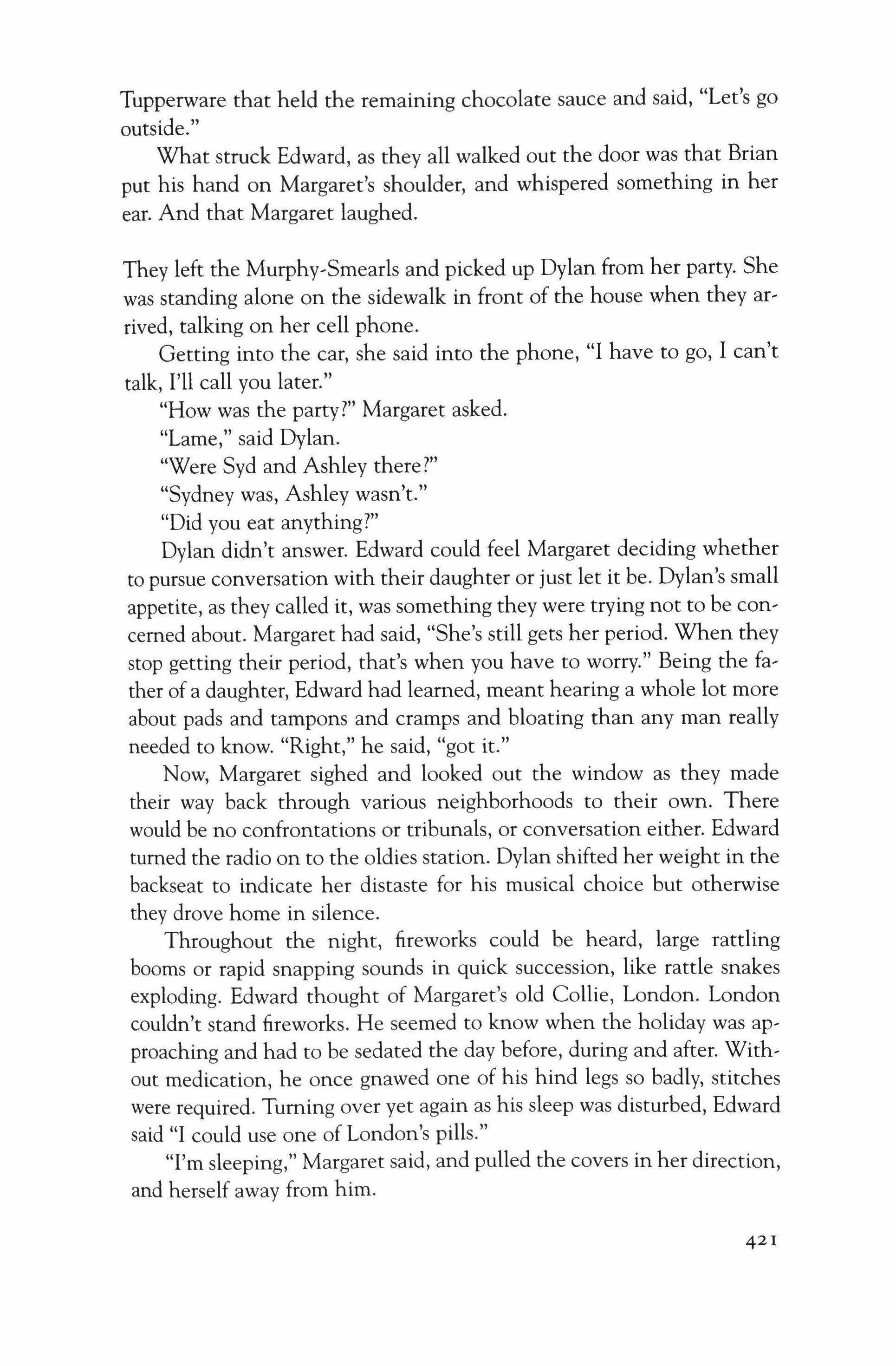
Tupperware that held the remaining chocolate sauce and said, "Let's go outside."
What struck Edward, as they all walked out the door was that Brian put his hand on Margaret's shoulder, and whispered something in her ear. And that Margaret laughed.
They left the Murphy-Smearls and picked up Dylan from her party. She was standing alone on the sidewalk in front of the house when they arrived, talking on her cell phone.
Getting into the car, she said into the phone, "I have to go, I can't talk, I'll call you later."
"How was the party?" Margaret asked.
"Lame," said Dylan.
"Were Syd and Ashley there?"
"Sydney was, Ashley wasn't."
"Did you eat anything?"
Dylan didn't answer. Edward could feel Margaret deciding whether to pursue conversation with their daughter or just let it be. Dylan's small appetite, as they called it, was something they were trying not to be concerned about. Margaret had said, "She's still gets her period. When they stop getting their period, that's when you have to worry." Being the father of a daughter, Edward had learned, meant hearing a whole lot more about pads and tampons and cramps and bloating than any man really needed to know. "Right," he said, "got it."
Now, Margaret sighed and looked out the window as they made their way back through various neighborhoods to their own. There would be no confrontations or tribunals, or conversation either. Edward turned the radio on to the oldies station. Dylan shifted her weight in the backseat to indicate her distaste for his musical choice but otherwise they drove home in silence.
Throughout the night, fireworks could be heard, large rattling booms or rapid snapping sounds in quick succession, like rattle snakes exploding. Edward thought of Margaret's old Collie, London. London couldn't stand fireworks. He seemed to know when the holiday was approaching and had to be sedated the day before, during and after. Without medication, he once gnawed one of his hind legs so badly, stitches were required. Turning over yet again as his sleep was disturbed, Edward said "I could use one of London's pills."
"I'm sleeping," Margaret said, and pulled the covers in her direction, and herself away from him.
421
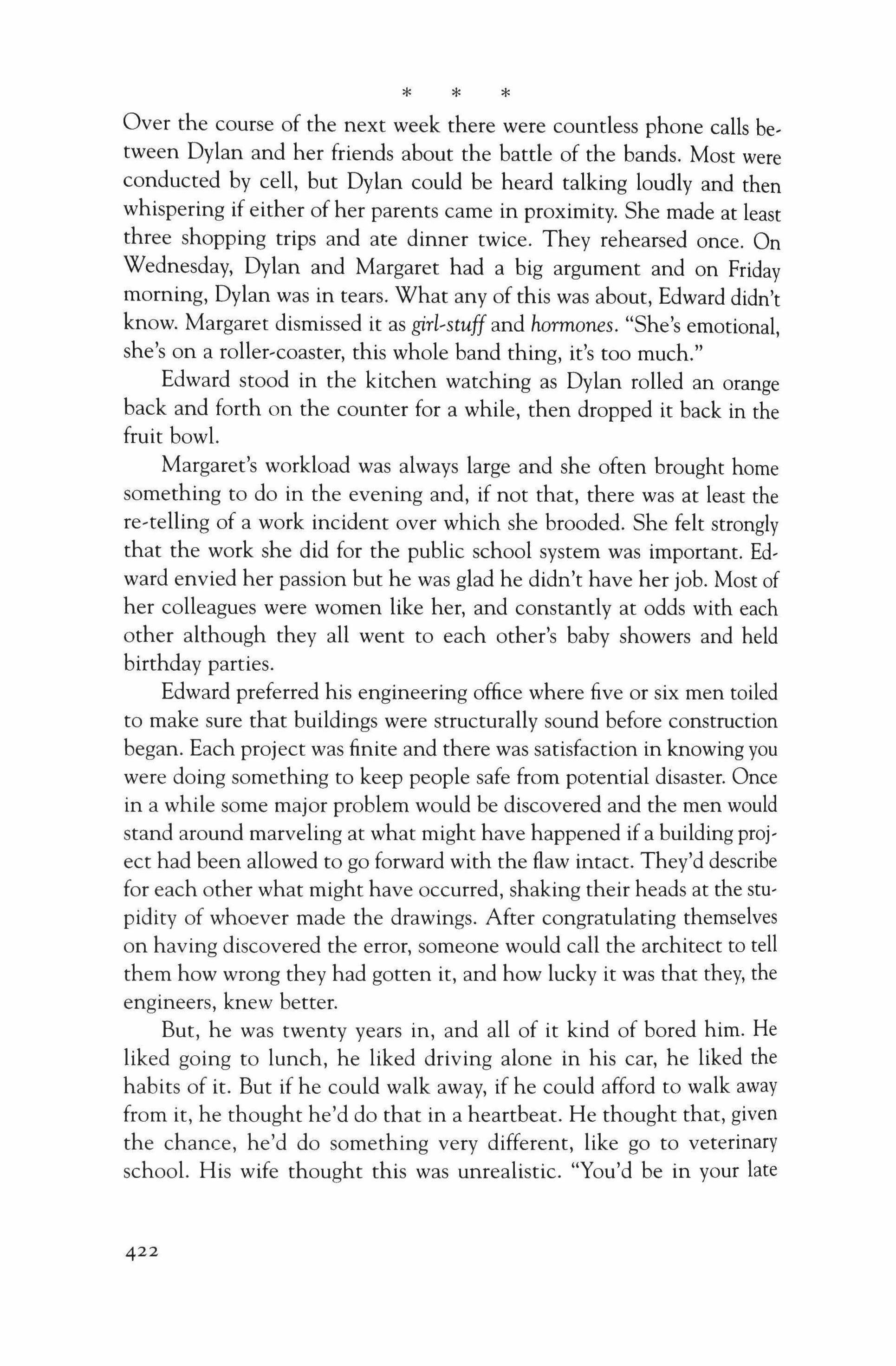
Over the course of the next week there were countless phone calls between Dylan and her friends about the battle of the bands. Most were conducted by cell, but Dylan could be heard talking loudly and then whispering if either of her parents came in proximity. She made at least three shopping trips and ate dinner twice. They rehearsed once. On Wednesday, Dylan and Margaret had a big argument and on Friday morning, Dylan was in tears. What any of this was about, Edward didn't know. Margaret dismissed it as girl�stuff and hormones. "She's emotional, she's on a roller-coaster, this whole band thing, it's too much."
Edward stood in the kitchen watching as Dylan rolled an orange back and forth on the counter for a while, then dropped it back in the fruit bowl.
Margaret's workload was always large and she often brought home something to do in the evening and, if not that, there was at least the re-telling of a work incident over which she brooded. She felt strongly that the work she did for the public school system was important. Edward envied her passion but he was glad he didn't have her job. Most of her colleagues were women like her, and constantly at odds with each other although they all went to each other's baby showers and held birthday parties.
Edward preferred his engineering office where five or six men toiled to make sure that buildings were structurally sound before construction began. Each project was finite and there was satisfaction in knowing you were doing something to keep people safe from potential disaster. Once in a while some major problem would be discovered and the men would stand around marveling at what might have happened if a building project had been allowed to go forward with the flaw intact. They'd describe for each other what might have occurred, shaking their heads at the stupidity of whoever made the drawings. After congratulating themselves on having discovered the error, someone would call the architect to tell them how wrong they had gotten it, and how lucky it was that they, the engineers, knew better.
But, he was twenty years in, and all of it kind of bored him. He liked going to lunch, he liked driving alone in his car, he liked the habits of it. But if he could walk away, if he could afford to walk away from it, he thought he'd do that in a heartbeat. He thought that, given the chance, he'd do something very different, like go to veterinary school. His wife thought this was unrealistic. "You'd be in your late
* * *
422
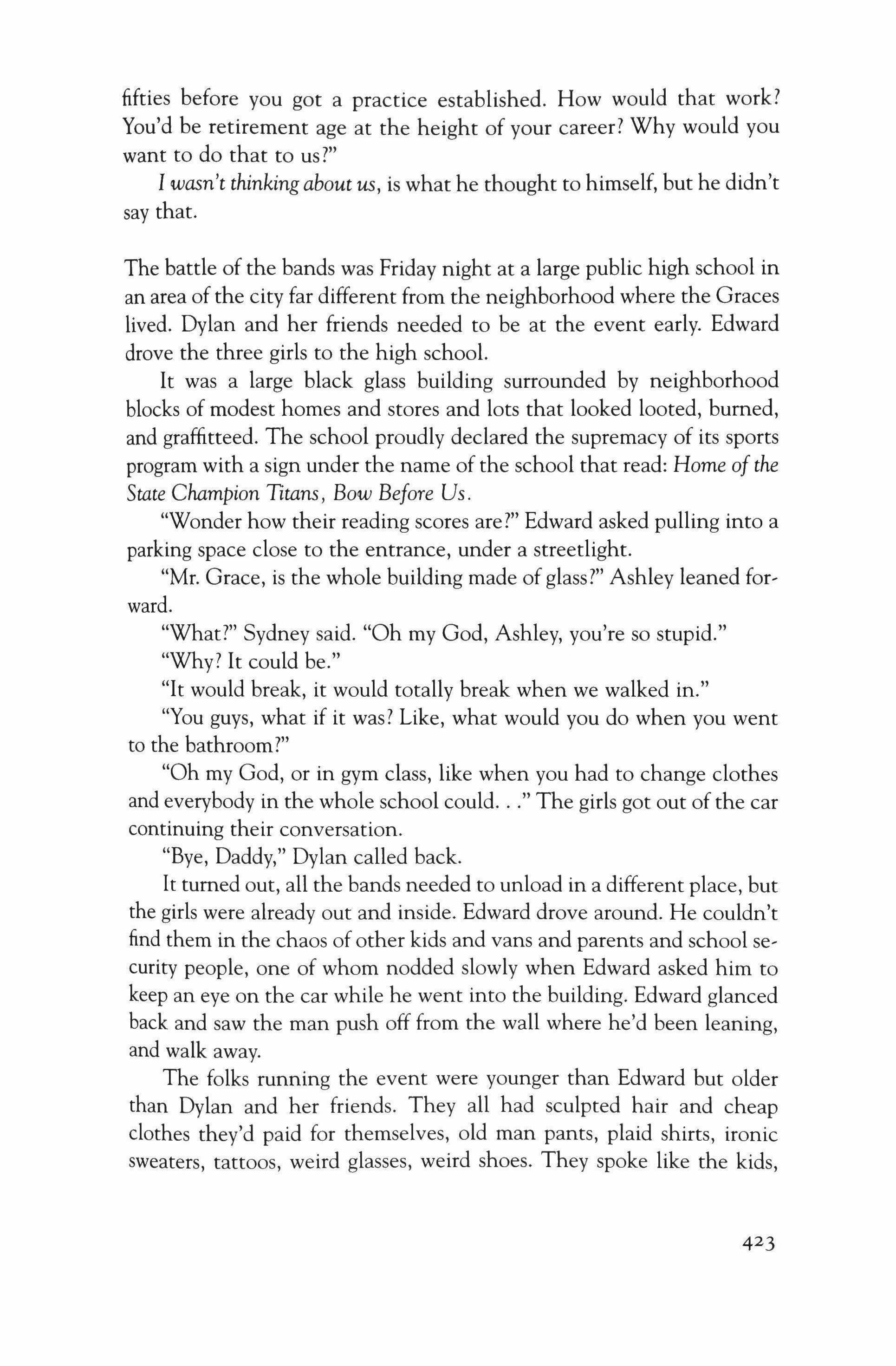
fifties before you got a practice established. How would that work? You'd be retirement age at the height of your career? Why would you want to do that to us?"
I wasn't thinking about us, is what he thought to himself, but he didn't say that.
The battle of the bands was Friday night at a large public high school in an area of the city far different from the neighborhood where the Graces lived. Dylan and her friends needed to be at the event early. Edward drove the three girls to the high school.
It was a large black glass building surrounded by neighborhood blocks of modest homes and stores and lots that looked looted, burned, and graffitteed. The school proudly declared the supremacy of its sports program with a sign under the name of the school that read: Home of the State Champion Titans, Bow Before Us.
"Wonder how their reading scores are?" Edward asked pulling into a parking space close to the entrance, under a streetlight.
"Mr. Grace, is the whole building made of glass?" Ashley leaned forward.
"What?" Sydney said. "Oh my God, Ashley, you're so stupid."
"Why? It could be."
"It would break, it would totally break when we walked in."
"You guys, what if it was? Like, what would you do when you went to the bathroom?"
"Oh my God, or in gym class, like when you had to change clothes and everybody in the whole school could The girls got out of the car continuing their conversation.
"Bye, Daddy," Dylan called back.
It turned out, all the bands needed to unload in a different place, but the girls were already out and inside. Edward drove around. He couldn't find them in the chaos of other kids and vans and parents and school security people, one of whom nodded slowly when Edward asked him to keep an eye on the car while he went into the building. Edward glanced back and saw the man push off from the wall where he'd been leaning, and walk away.
The folks running the event were younger than Edward but older than Dylan and her friends. They all had sculpted hair and cheap clothes they'd paid for themselves, old man pants, plaid shirts, ironic sweaters, tattoos, weird glasses, weird shoes. They spoke like the kids,
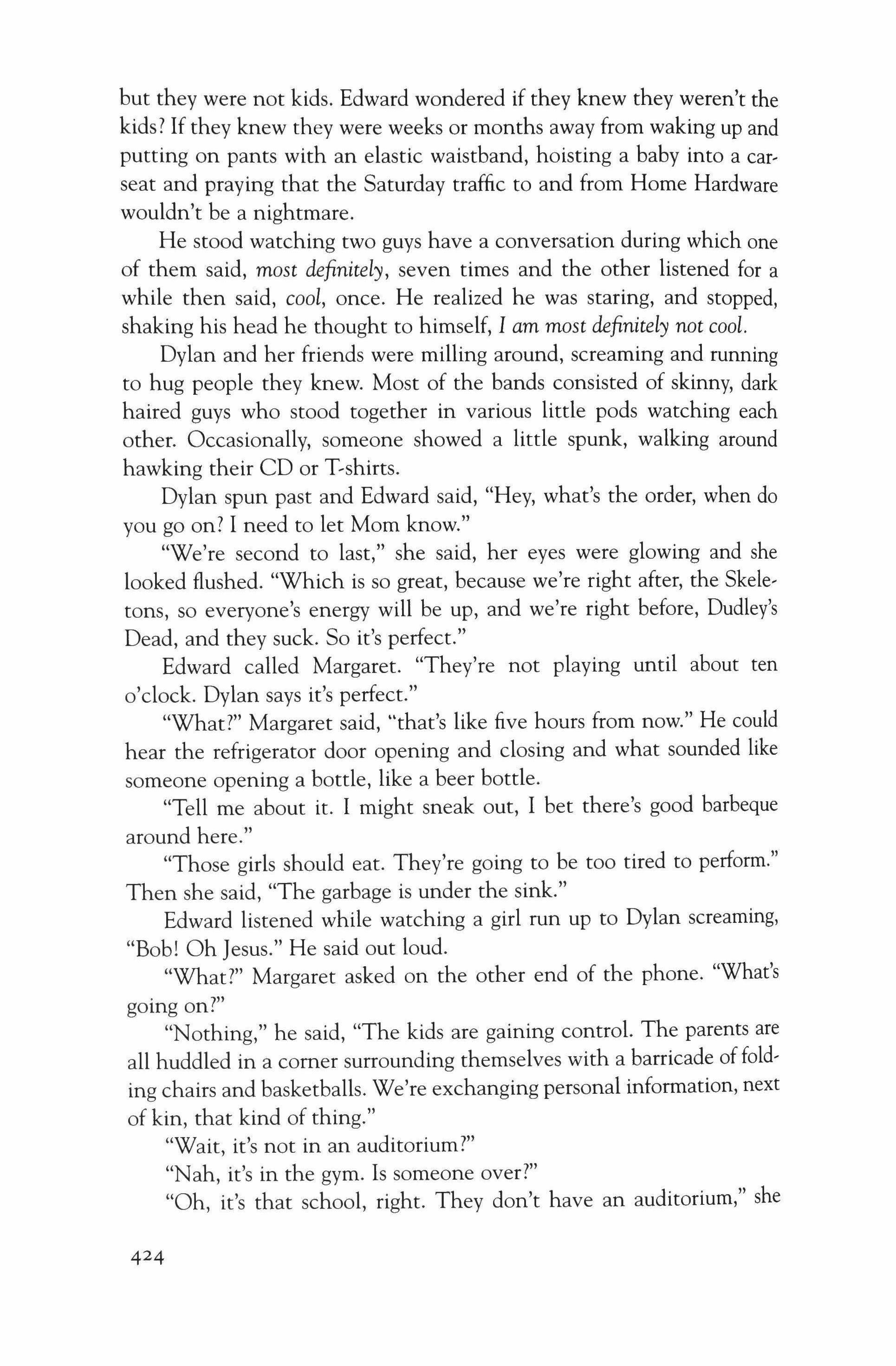
but they were not kids. Edward wondered if they knew they weren't the kids? If they knew they were weeks or months away from waking up and putting on pants with an elastic waistband, hoisting a baby into a carseat and praying that the Saturday traffic to and from Home Hardware wouldn't be a nightmare.
He stood watching two guys have a conversation during which one of them said, most definitely, seven times and the other listened for a while then said, cool, once. He realized he was staring, and stopped, shaking his head he thought to himself, I am most definitely not cool.
Dylan and her friends were milling around, screaming and running to hug people they knew. Most of the bands consisted of skinny, dark haired guys who stood together in various little pods watching each other. Occasionally, someone showed a little spunk, walking around hawking their CD or T-shirts.
Dylan spun past and Edward said, "Hey, what's the order, when do you go on? I need to let Mom know."
"We're second to last," she said, her eyes were glowing and she looked flushed. "Which is so great, because we're right after, the Skeletons, so everyone's energy will be up, and we're right before, Dudley's Dead, and they suck. So it's perfect."
Edward called Margaret. "They're not playing until about ten o'clock. Dylan says it's perfect."
"What?" Margaret said, "that's like five hours from now." He could hear the refrigerator door opening and closing and what sounded like someone opening a bottle, like a beer bottle.
"Tell me about it. I might sneak out, I bet there's good barbeque around here."
"Those girls should eat. They're going to be too tired to perform." Then she said, "The garbage is under the sink."
Edward listened while watching a girl run up to Dylan screaming, "Bob! Oh Jesus." He said out loud.
"What?" Margaret asked on the other end of the phone. "What's going on?"
"Nothing," he said, "The kids are gaining control. The parents are all huddled in a comer surrounding themselves with a barricade offolding chairs and basketballs. We're exchanging personal information, next of kin, that kind of thing."
"Wait, it's not in an auditorium?"
"Nah, it's in the gym. Is someone over?"
"Oh, it's that school, right. They don't have an auditorium," she
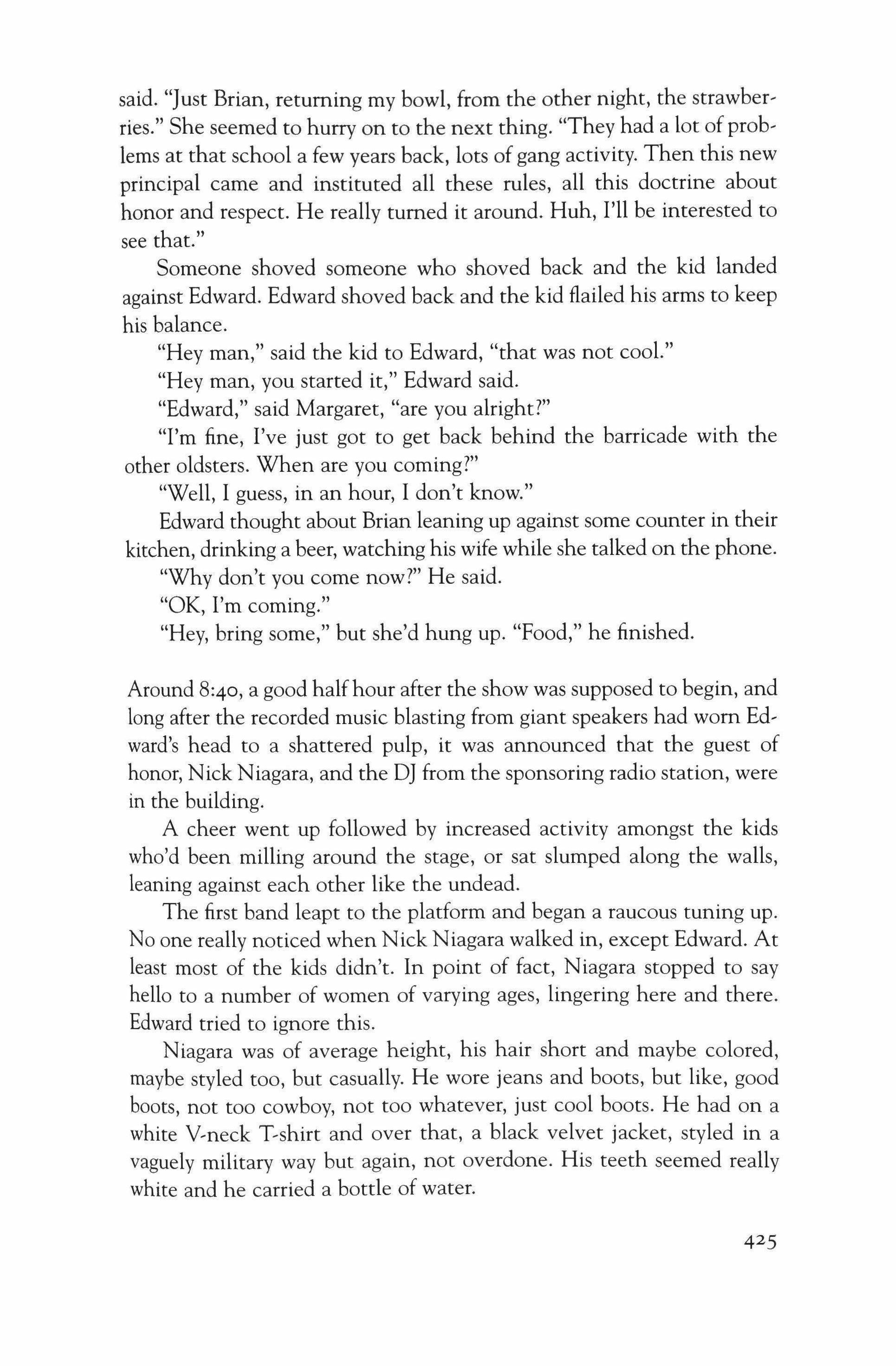
said. "Just Brian, returning my bowl, from the other night, the strawberries." She seemed to hurry on to the next thing. "They had a lot of problems at that school a few years back, lots of gang activity. Then this new principal came and instituted all these rules, all this doctrine about honor and respect. He really turned it around. Huh, I'll be interested to see that."
Someone shoved someone who shoved back and the kid landed against Edward. Edward shoved back and the kid flailed his arms to keep his balance.
"Hey man," said the kid to Edward, "that was not cool."
"Hey man, you started it," Edward said.
"Edward," said Margaret, "are you alright?"
"I'm fine, I've just got to get back behind the barricade with the other oldsters. When are you coming?"
"Well, I guess, in an hour, I don't know."
Edward thought about Brian leaning up against some counter in their kitchen, drinking a beer, watching his wife while she talked on the phone.
"Why don't you come now?" He said.
"OK, I'm coming."
"Hey, bring some," but she'd hung up. "Food," he finished.
Around 8:40, a good halfhour after the show was supposed to begin, and long after the recorded music blasting from giant speakers had worn Edward's head to a shattered pulp, it was announced that the guest of honor, Nick Niagara, and the DJ from the sponsoring radio station, were in the building.
A cheer went up followed by increased activity amongst the kids who'd been milling around the stage, or sat slumped along the walls, leaning against each other like the undead.
The first band leapt to the platform and began a raucous tuning up. No one really noticed when Nick Niagara walked in, except Edward. At least most of the kids didn't. In point of fact, Niagara stopped to say hello to a number of women of varying ages, lingering here and there. Edward tried to ignore this.
Niagara was of average height, his hair short and maybe colored, maybe styled too, but casually. He wore jeans and boots, but like, good boots, not too cowboy, not too whatever, just cool boots. He had on a white V-neck T-shirt and over that, a black velvet jacket, styled in a vaguely military way but again, not overdone. His teeth seemed really white and he carried a bottle of water.
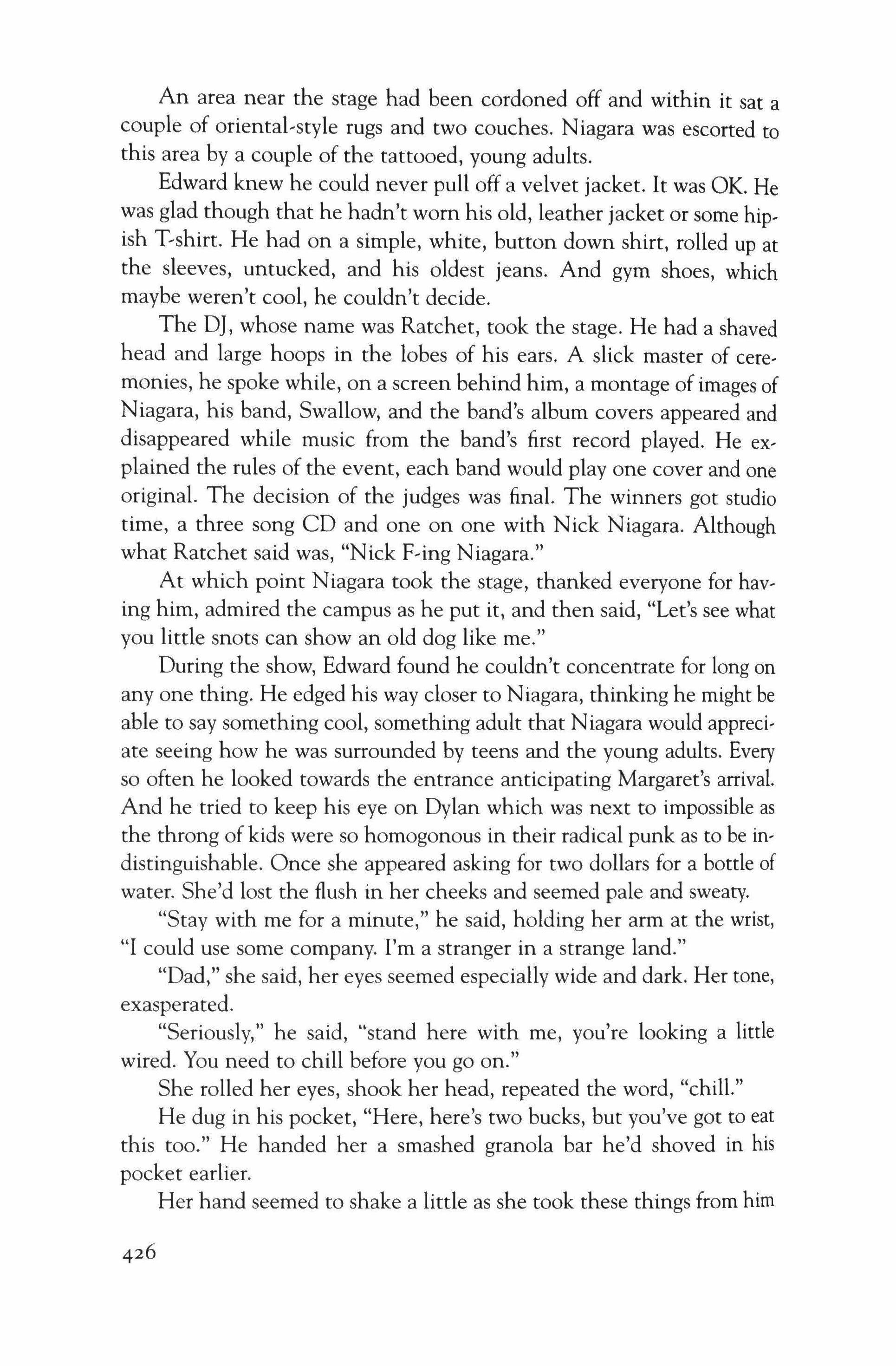
An area near the stage had been cordoned off and within it sat a couple of oriental-style rugs and two couches. Niagara was escorted to this area by a couple of the tattooed, young adults.
Edward knew he could never pull off a velvet jacket. It was OK. He was glad though that he hadn't worn his old, leather jacket or some hipish T-shirt. He had on a simple, white, button down shirt, rolled up at the sleeves, untucked, and his oldest jeans. And gym shoes, which maybe weren't cool, he couldn't decide.
The OJ, whose name was Ratchet, took the stage. He had a shaved head and large hoops in the lobes of his ears. A slick master of ceremonies, he spoke while, on a screen behind him, a montage of images of Niagara, his band, Swallow, and the band's album covers appeared and disappeared while music from the band's first record played. He explained the rules of the event, each band would play one cover and one original. The decision of the judges was final. The winners got studio time, a three song CD and one on one with Nick Niagara. Although what Ratchet said was, "Nick F-ing Niagara."
At which point Niagara took the stage, thanked everyone for having him, admired the campus as he put it, and then said, "Let's see what you little snots can show an old dog like me."
During the show, Edward found he couldn't concentrate for long on anyone thing. He edged his way closer to Niagara, thinking he might be able to say something cool, something adult that Niagara would appreciate seeing how he was surrounded by teens and the young adults. Every so often he looked towards the entrance anticipating Margaret's arrival. And he tried to keep his eye on Dylan which was next to impossible as the throng of kids were so homogonous in their radical punk as to be indistinguishable. Once she appeared asking for two dollars for a bottle of water. She'd lost the flush in her cheeks and seemed pale and sweaty.
"Stay with me for a minute," he said, holding her arm at the wrist, "I could use some company. I'm a stranger in a strange land."
"Dad," she said, her eyes seemed especially wide and dark. Her tone, exasperated.
"Seriously," he said, "stand here with me, you're looking a little wired. You need to chill before you go on."
She rolled her eyes, shook her head, repeated the word, "chill."
He dug in his pocket, "Here, here's two bucks, but you've got to eat this too." He handed her a smashed granola bar he'd shoved in his pocket earlier.
Her hand seemed to shake a little as she took these things from him
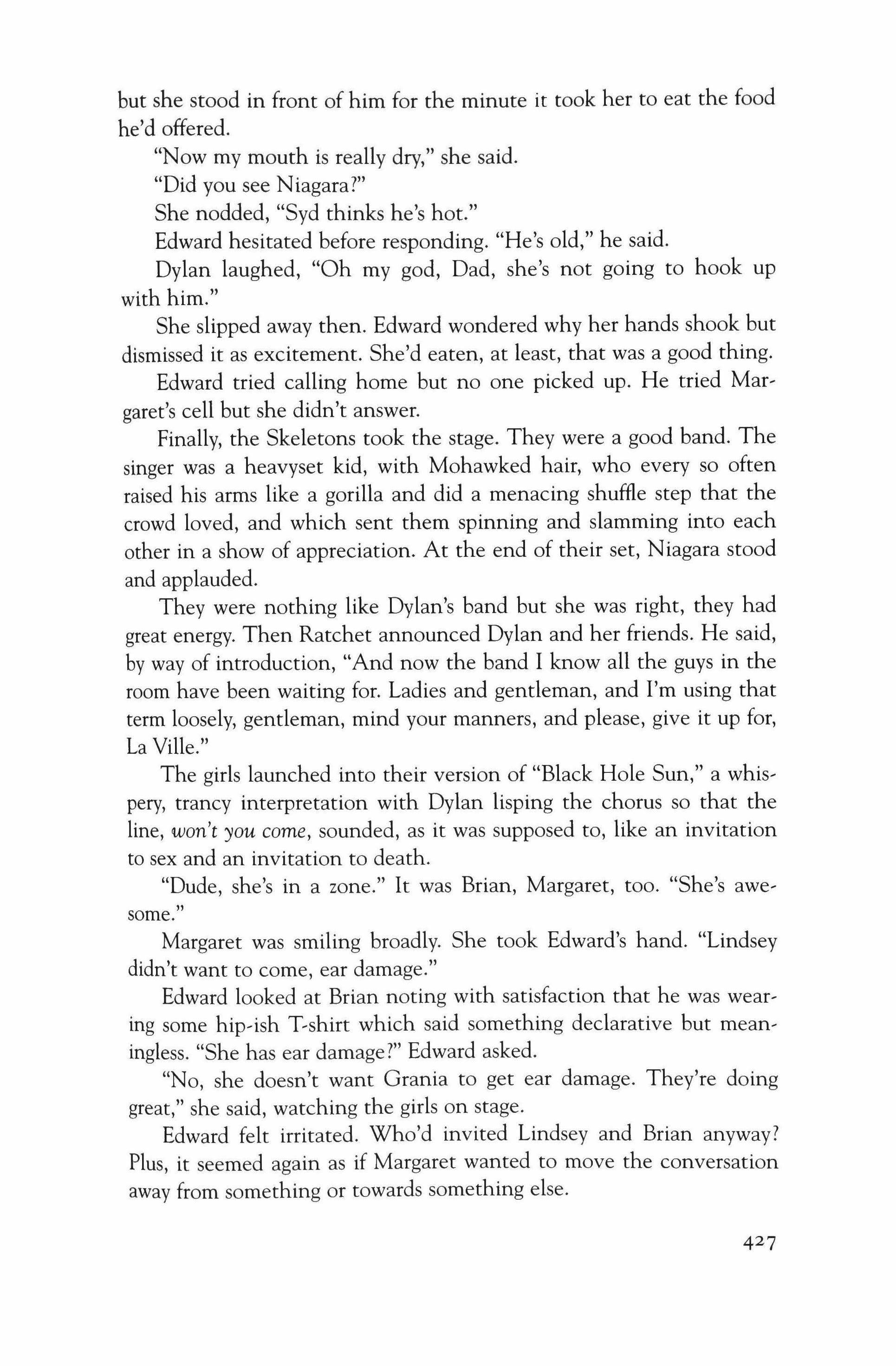
but she stood in front of him for the minute it took her to eat the food he'd offered.
"Now my mouth is really dry," she said.
"Did you see Niagara?"
She nodded, "Syd thinks he's hot."
Edward hesitated before responding. "He's old," he said.
Dylan laughed, "Oh my god, Dad, she's not going to hook up with him."
She slipped away then. Edward wondered why her hands shook but dismissed it as excitement. She'd eaten, at least, that was a good thing.
Edward tried calling home but no one picked up. He tried Margaret's cell but she didn't answer.
Finally, the Skeletons took the stage. They were a good band. The singer was a heavyset kid, with Mohawked hair, who every so often raised his arms like a gorilla and did a menacing shuffle step that the crowd loved, and which sent them spinning and slamming into each other in a show of appreciation. At the end of their set, Niagara stood and applauded.
They were nothing like Dylan's band but she was right, they had great energy. Then Ratchet announced Dylan and her friends. He said, by way of introduction, "And now the band I know all the guys in the room have been waiting for. Ladies and gentleman, and I'm using that term loosely, gentleman, mind your manners, and please, give it up for, La Ville."
The girls launched into their version of "Black Hole Sun," a whispery, trancy interpretation with Dylan lisping the chorus so that the line, won't you come, sounded, as it was supposed to, like an invitation to sex and an invitation to death.
"Dude, she's in a zone." It was Brian, Margaret, too. "She's awesome."
Margaret was smiling broadly. She took Edward's hand. "Lindsey didn't want to come, ear damage."
Edward looked at Brian noting with satisfaction that he was wearing some hip-ish T-shirt which said something declarative but meaningless. "She has ear damage?" Edward asked.
"No, she doesn't want Grania to get ear damage. They're doing great," she said, watching the girls on stage.
Edward felt irritated. Who'd invited Lindsey and Brian anyway? Plus, it seemed again as if Margaret wanted to move the conversation away from something or towards something else.
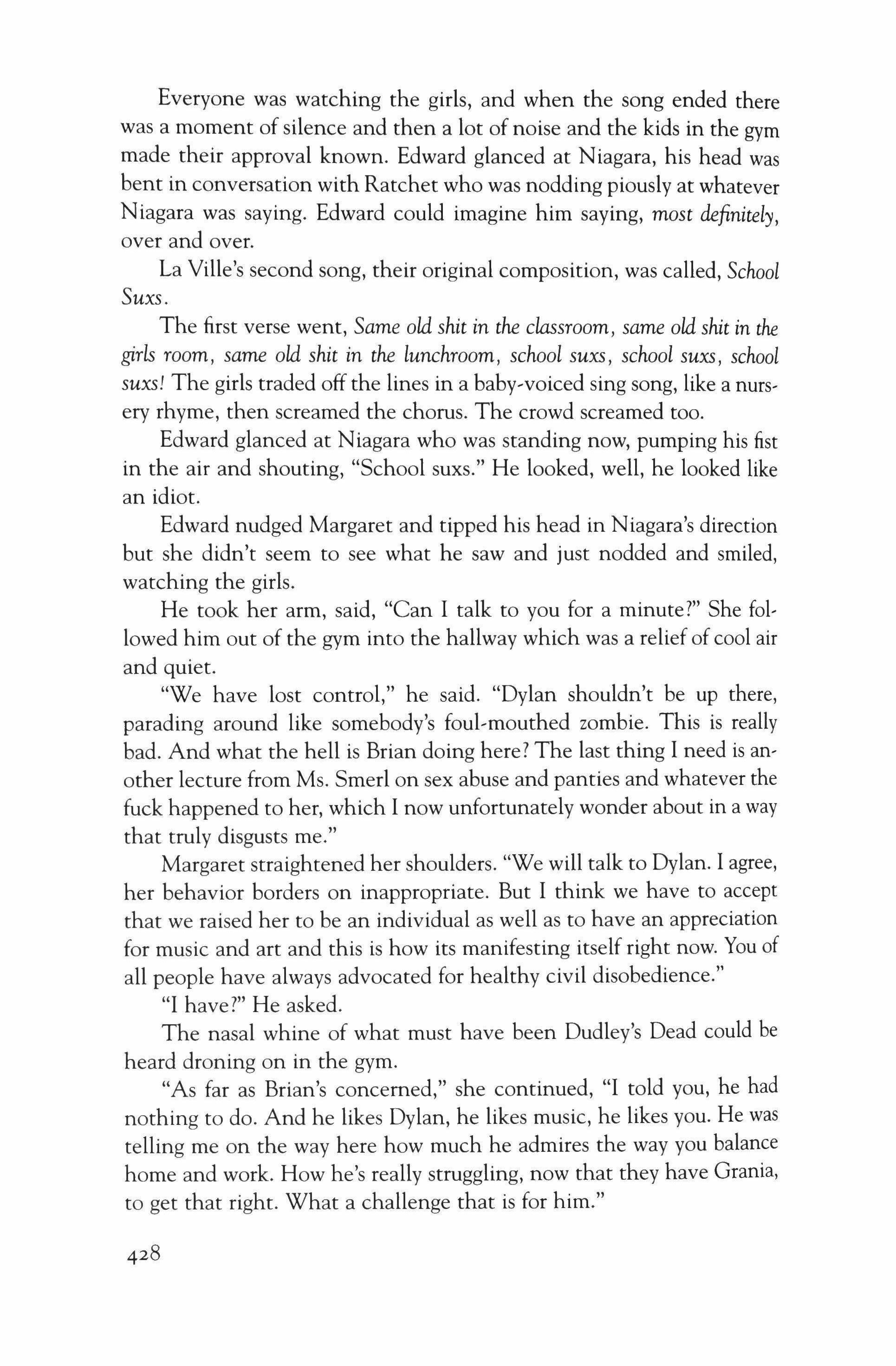
Everyone was watching the girls, and when the song ended there was a moment of silence and then a lot of noise and the kids in the gym made their approval known. Edward glanced at Niagara, his head was bent in conversation with Ratchet who was nodding piously at whatever Niagara was saying. Edward could imagine him saying, most definitely, over and over.
La Ville's second song, their original composition, was called, School Suxs.
The first verse went, Same old shit in the classroom, same old shit in the girls room, same old shit in the lunchroom, school suxs, school suxs, school suxs! The girls traded off the lines in a baby-voiced sing song, like a nursery rhyme, then screamed the chorus. The crowd screamed too.
Edward glanced at Niagara who was standing now, pumping his fist in the air and shouting, "School suxs." He looked, well, he looked like an idiot.
Edward nudged Margaret and tipped his head in Niagara's direction but she didn't seem to see what he saw and just nodded and smiled, watching the girls.
He took her arm, said, "Can 1 talk to you for a minute?" She followed him out of the gym into the hallway which was a relief of cool air and quiet.
"We have lost control," he said. "Dylan shouldn't be up there, parading around like somebody's foul-mouthed zombie. This is really bad. And what the hell is Brian doing here? The last thing 1 need is another lecture from Ms. Smerl on sex abuse and panties and whatever the fuck happened to her, which 1 now unfortunately wonder about in a way that truly disgusts me."
Margaret straightened her shoulders. "We will talk to Dylan. 1 agree, her behavior borders on inappropriate. But 1 think we have to accept that we raised her to be an individual as well as to have an appreciation for music and art and this is how its manifesting itself right now. You of all people have always advocated for healthy civil disobedience."
"1 have?" He asked.
The nasal whine of what must have been Dudley's Dead could be heard droning on in the gym.
"As far as Brian's concerned," she continued, "1 told you, he had nothing to do. And he likes Dylan, he likes music, he likes you. He was telling me on the way here how much he admires the way you balance home and work. How he's really struggling, now that they have Grania, to get that right. What a challenge that is for him."
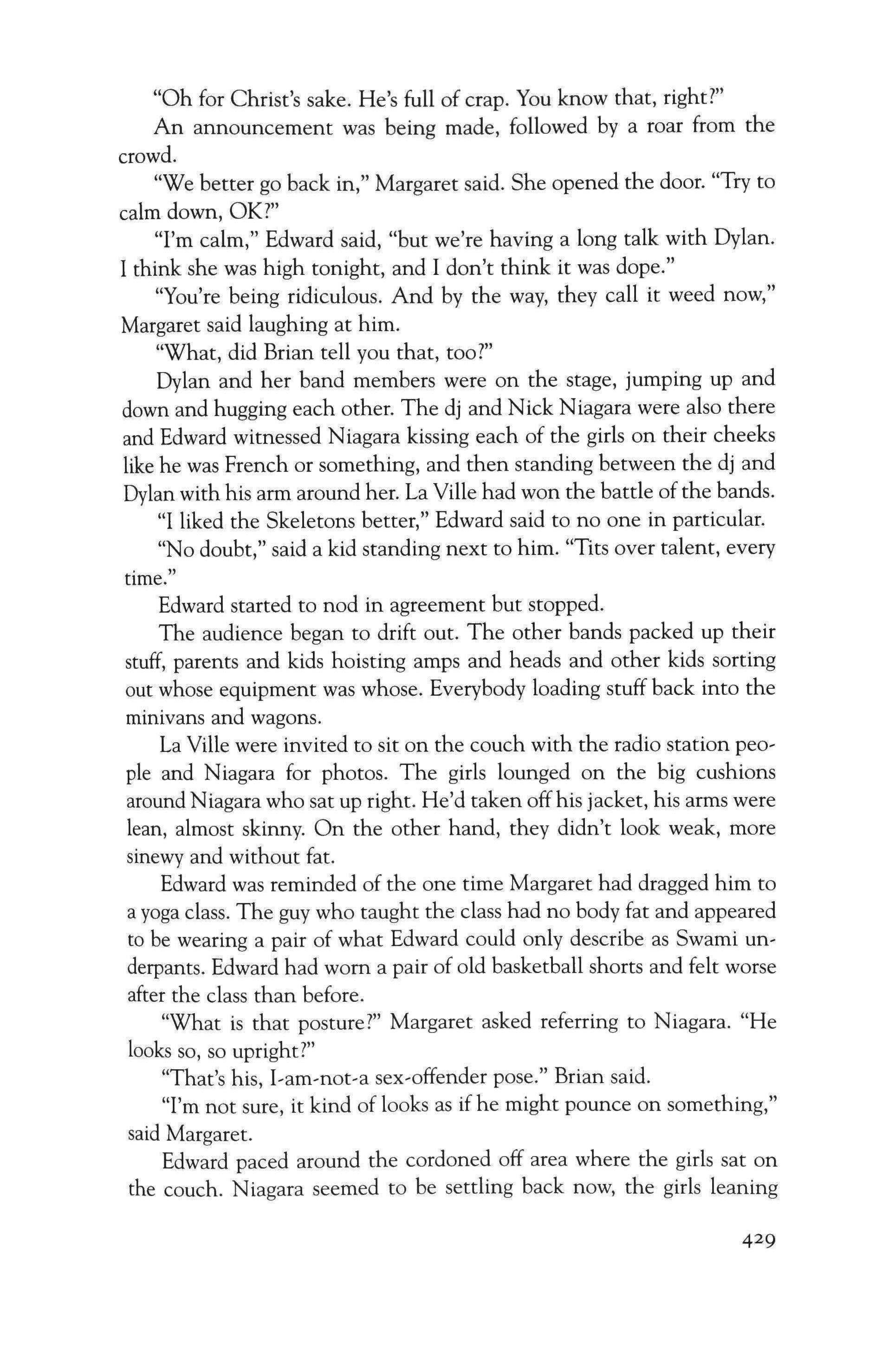
"Oh for Christ's sake. He's full of crap. You know that, right?"
An announcement was being made, followed by a roar from the crowd.
"We better go back in," Margaret said. She opened the door. "Try to calm down, OK?"
"I'm calm," Edward said, "but we're having a long talk with Dylan. I think she was high tonight, and I don't think it was dope."
"You're being ridiculous. And by the way, they call it weed now," Margaret said laughing at him.
"What, did Brian tell you that, too?"
Dylan and her band members were on the stage, jumping up and down and hugging each other. The dj and Nick Niagara were also there and Edward witnessed Niagara kissing each of the girls on their cheeks like he was French or something, and then standing between the dj and Dylan with his arm around her. La Ville had won the battle of the bands.
"I liked the Skeletons better," Edward said to no one in particular.
"No doubt," said a kid standing next to him. "Tits over talent, every time."
Edward started to nod in agreement but stopped. The audience began to drift out. The other bands packed up their stuff, parents and kids hoisting amps and heads and other kids sorting out whose equipment was whose. Everybody loading stuff back into the minivans and wagons.
La Ville were invited to sit on the couch with the radio station people and Niagara for photos. The girls lounged on the big cushions around Niagara who sat up right. He'd taken off his jacket, his arms were lean, almost skinny. On the other hand, they didn't look weak, more sinewy and without fat.
Edward was reminded of the one time Margaret had dragged him to a yoga class. The guy who taught the class had no body fat and appeared to be wearing a pair of what Edward could only describe as Swami underpants. Edward had worn a pair of old basketball shorts and felt worse after the class than before.
"What is that posture?" Margaret asked referring to Niagara. "He looks so, so upright?"
"That's his, l-am-not-a sex-offender pose." Brian said.
"I'm not sure, it kind of looks as if he might pounce on something," said Margaret.
Edward paced around the cordoned off area where the girls sat on the couch. Niagara seemed to be settling back now, the girls leaning
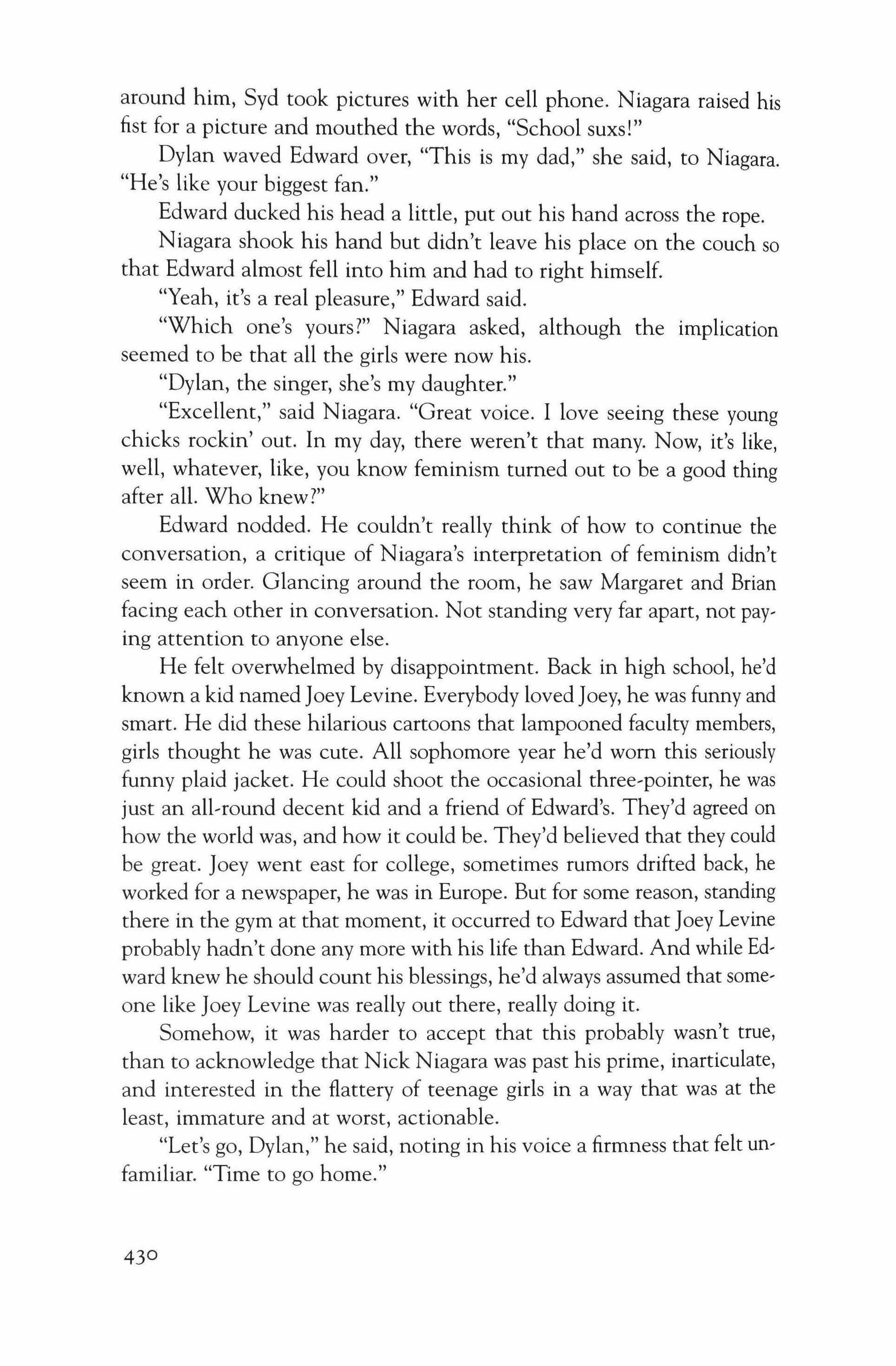
around him, Syd took pictures with her cell phone. Niagara raised his fist for a picture and mouthed the words, "School suxs!"
Dylan waved Edward over, "This is my dad," she said, to Niagara. "He's like your biggest fan."
Edward ducked his head a little, put out his hand across the rope. Niagara shook his hand but didn't leave his place on the couch so that Edward almost fell into him and had to right himself.
"Yeah, it's a real pleasure," Edward said.
"Which one's yours?" Niagara asked, although the implication seemed to be that all the girls were now his.
"Dylan, the singer, she's my daughter."
"Excellent," said Niagara. "Great voice. I love seeing these young chicks rockin' out. In my day, there weren't that many. Now, it's like, well, whatever, like, you know feminism turned out to be a good thing after alL Who knew?"
Edward nodded. He couldn't really think of how to continue the conversation, a critique of Niagara's interpretation of feminism didn't seem in order. Glancing around the room, he saw Margaret and Brian facing each other in conversation. Not standing very far apart, not paying attention to anyone else.
He felt overwhelmed by disappointment. Back in high school, he'd known a kid named Joey Levine. Everybody loved Joey, he was funny and smart. He did these hilarious cartoons that lampooned faculty members, girls thought he was cute. All sophomore year he'd worn this seriously funny plaid jacket. He could shoot the occasional three-pointer, he was just an all-round decent kid and a friend of Edward's. They'd agreed on how the world was, and how it could be. They'd believed that they could be great. Joey went east for college, sometimes rumors drifted back, he worked for a newspaper, he was in Europe. But for some reason, standing there in the gym at that moment, it occurred to Edward that Joey Levine probably hadn't done any more with his life than Edward. And while Edward knew he should count his blessings, he'd always assumed that someone like Joey Levine was really out there, really doing it.
Somehow, it was harder to accept that this probably wasn't true, than to acknowledge that Nick Niagara was past his prime, inarticulate, and interested in the flattery of teenage girls in a way that was at the least, immature and at worst, actionable.
"Let's go, Dylan," he said, noting in his voice a firmness that felt unfamiliar. "Time to go home."
430
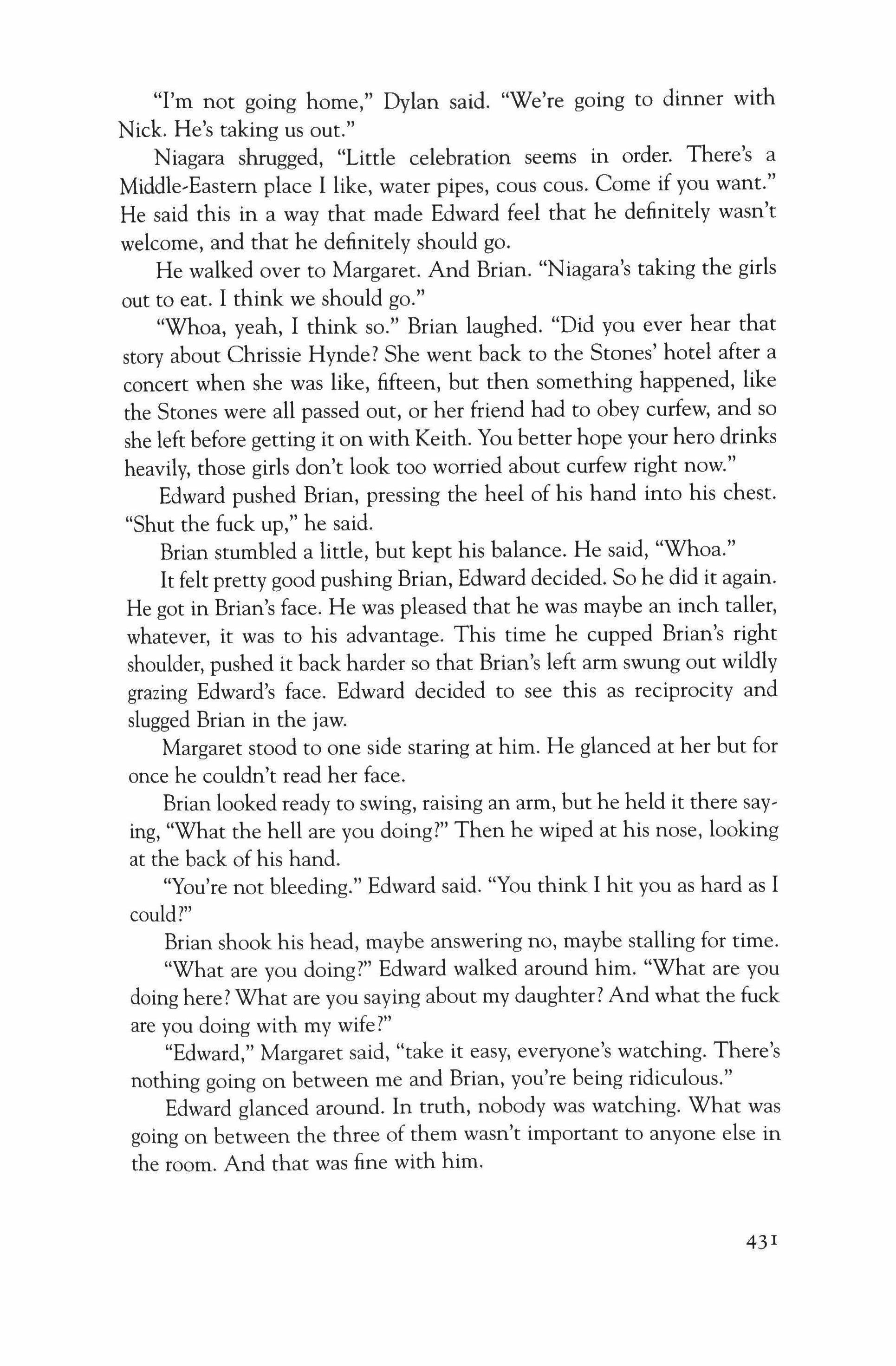
"I'm not going home," Dylan said. "We're going to dinner with Nick. He's taking us out."
Niagara shrugged, "Little celebration seems in order. There's a Middle-Eastern place I like, water pipes, cous cous. Come if you want." He said this in a way that made Edward feel that he definitely wasn't welcome, and that he definitely should go.
He walked over to Margaret. And Brian. "Niagara's taking the girls out to eat. I think we should go."
"Whoa, yeah, I think so." Brian laughed. "Did you ever hear that story about Chrissie Hynde? She went back to the Stones' hotel after a concert when she was like, fifteen, but then something happened, like the Stones were all passed out, or her friend had to obey curfew, and so she left before getting it on with Keith. You better hope your hero drinks heavily, those girls don't look too worried about curfew right now."
Edward pushed Brian, pressing the heel of his hand into his chest. "Shut the fuck up," he said.
Brian stumbled a little, but kept his balance. He said, "Whoa." It felt pretty good pushing Brian, Edward decided. So he did it again. He got in Brian's face. He was pleased that he was maybe an inch taller, whatever, it was to his advantage. This time he cupped Brian's right shoulder, pushed it back harder so that Brian's left arm swung out wildly grazing Edward's face. Edward decided to see this as reciprocity and slugged Brian in the jaw.
Margaret stood to one side staring at him. He glanced at her but for once he couldn't read her face.
Brian looked ready to swing, raising an arm, but he held it there saying, "What the hell are you doing?" Then he wiped at his nose, looking at the back of his hand.
"You're not bleeding." Edward said. "You think I hit you as hard as I could?"
Brian shook his head, maybe answering no, maybe stalling for time. "What are you doing?" Edward walked around him. "What are you doing here? What are you saying about my daughter? And what the fuck are you doing with my wife?"
"Edward," Margaret said, "take it easy, everyone's watching. There's nothing going on between me and Brian, you're being ridiculous."
Edward glanced around. In truth, nobody was watching. What was going on between the three of them wasn't important to anyone else in the room. And that was fine with him.
431
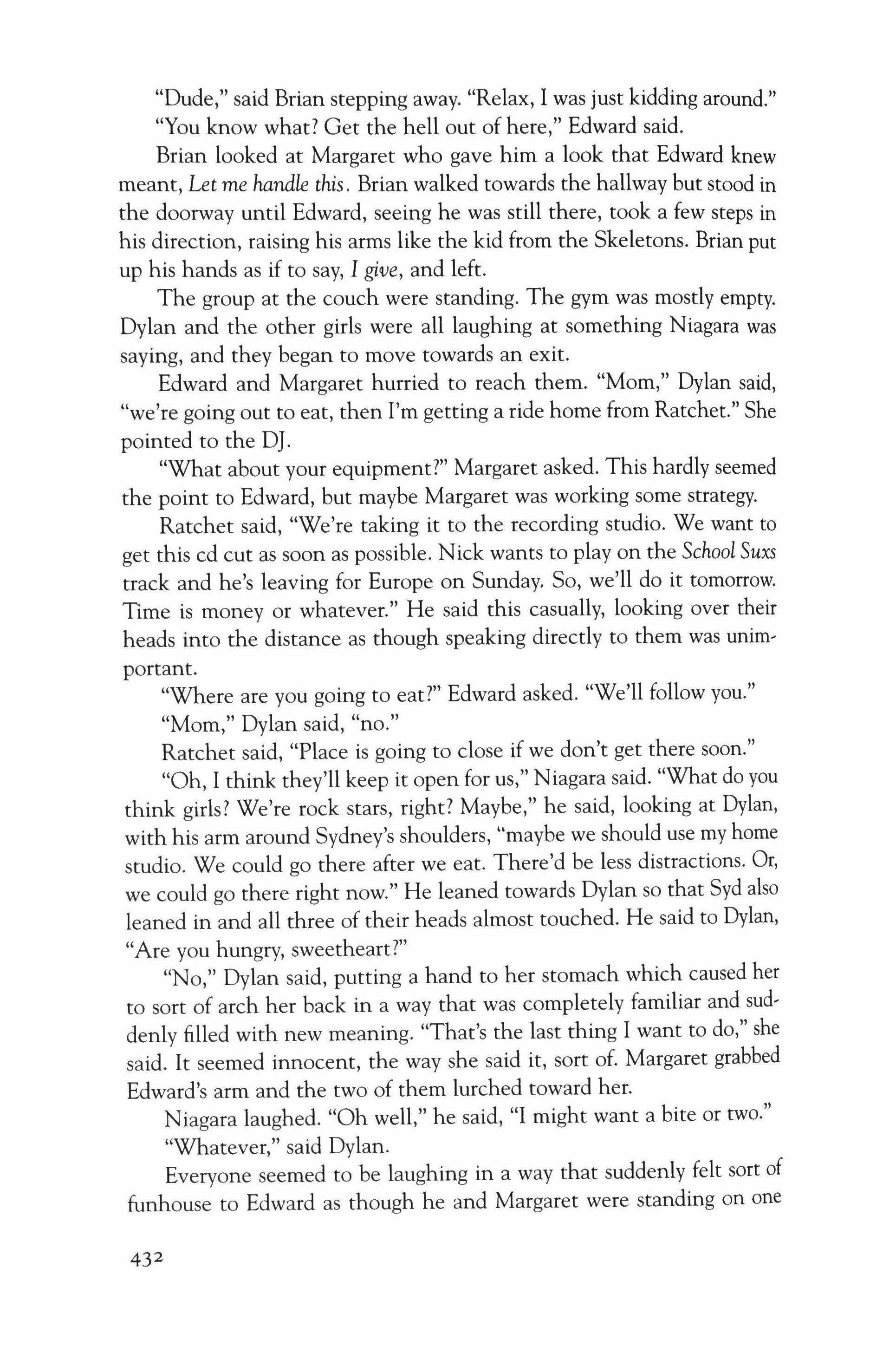
"Dude," said Brian stepping away. "Relax, I was just kidding around."
"You know what? Get the hell out of here," Edward said.
Brian looked at Margaret who gave him a look that Edward knew meant, Let me handle this. Brian walked towards the hallway but stood in the doorway until Edward, seeing he was still there, took a few steps in his direction, raising his arms like the kid from the Skeletons. Brian put up his hands as if to say, I give, and left.
The group at the couch were standing. The gym was mostly empty. Dylan and the other girls were all laughing at something Niagara was saying, and they began to move towards an exit.
Edward and Margaret hurried to reach them. "Mom," Dylan said, "we're going out to eat, then I'm getting a ride home from Ratchet." She pointed to the OJ.
"What about your equipment?" Margaret asked. This hardly seemed the point to Edward, but maybe Margaret was working some strategy.
Ratchet said, "We're taking it to the recording studio. We want to get this cd cut as soon as possible. Nick wants to play on the School Suxs track and he's leaving for Europe on Sunday. So, we'll do it tomorrow. Time is money or whatever." He said this casually, looking over their heads into the distance as though speaking directly to them was unimportant.
"Where are you going to eat?" Edward asked. "We'll follow you."
"Mom," Dylan said, "no."
Ratchet said, "Place is going to close if we don't get there soon."
"Oh, I think they'll keep it open for us," Niagara said. "What do you think girls? We're rock stars, right? Maybe," he said, looking at Dylan, with his arm around Sydney's shoulders, "maybe we should use my home studio. We could go there after we eat. There'd be less distractions. Or, we could go there right now." He leaned towards Dylan so that Syd also leaned in and all three of their heads almost touched. He said to Dylan, "Are you hungry, sweetheart?"
"No," Dylan said, putting a hand to her stomach which caused her to sort of arch her back in a way that was completely familiar and suddenly filled with new meaning. "That's the last thing I want to do," she said. It seemed innocent, the way she said it, sort of. Margaret grabbed Edward's arm and the two of them lurched toward her.
Niagara laughed. "Oh well," he said, "I might want a bite or two."
"Whatever," said Dylan.
Everyone seemed to be laughing in a way that suddenly felt sort of funhouse to Edward as though he and Margaret were standing on one
432
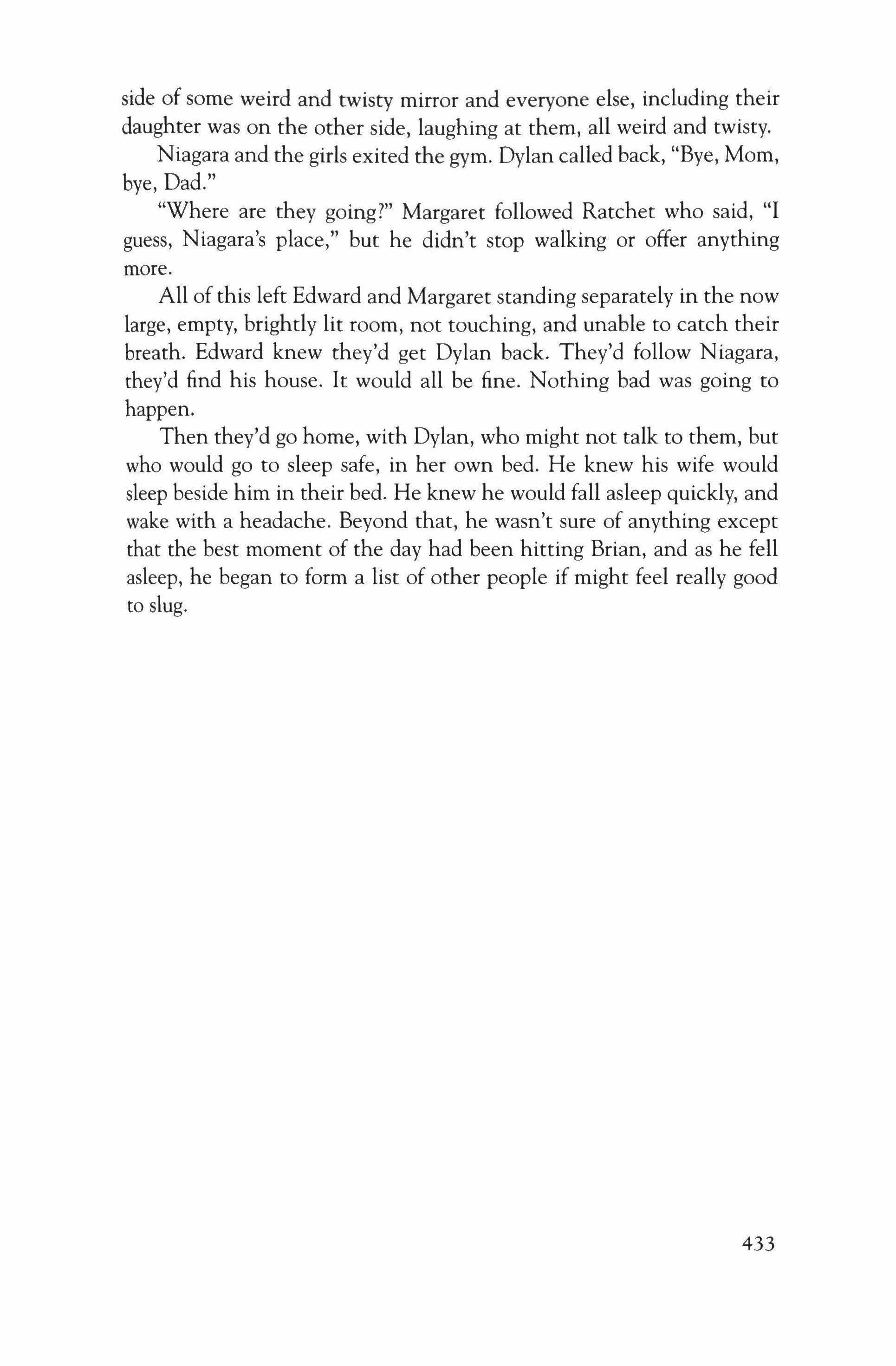
side of some weird and twisty mirror and everyone else, including their daughter was on the other side, laughing at them, all weird and twisty. Niagara and the girls exited the gym. Dylan called back, "Bye, Mom, bye, Dad."
"Where are they going?" Margaret followed Ratchet who said, "I guess, Niagara's place," but he didn't stop walking or offer anything more.
All of this left Edward and Margaret standing separately in the now large, empty, brightly lit room, not touching, and unable to catch their breath. Edward knew they'd get Dylan back. They'd follow Niagara, they'd find his house. It would all be fine. Nothing bad was going to happen.
Then they'd go home, with Dylan, who might not talk to them, but who would go to sleep safe, in her own bed. He knew his wife would sleep beside him in their bed. He knew he would fall asleep quickly, and wake with a headache. Beyond that, he wasn't sure of anything except that the best moment of the day had been hitting Brian, and as he fell asleep, he began to form a list of other people if might feel really good to slug.
433
Gary Adelman
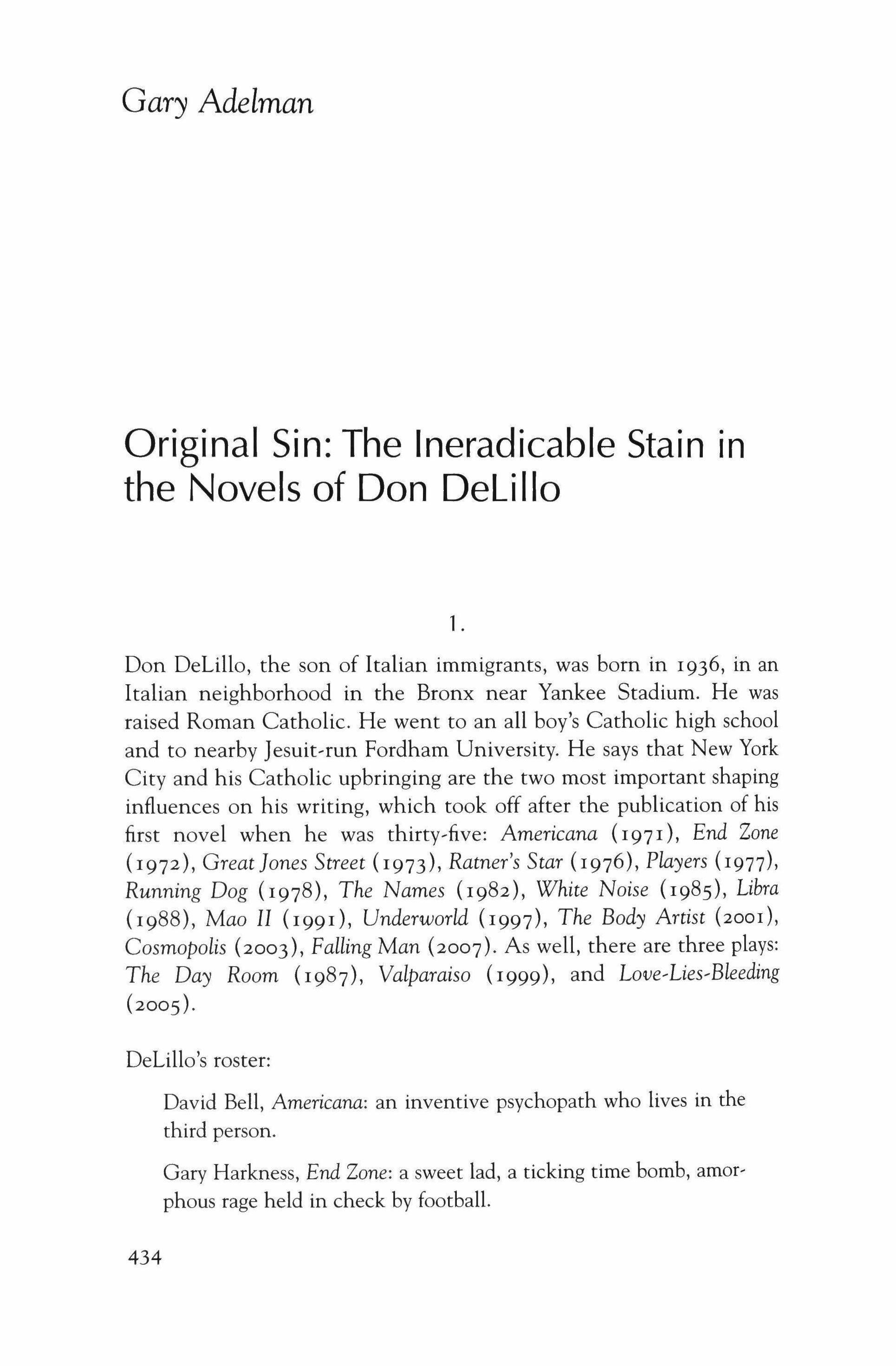
Original Sin: The Ineradicable Stain In the Novels of Don Delillo
1.
Don Delillo, the son of Italian immigrants, was born in 1936, in an Italian neighborhood in the Bronx near Yankee Stadium. He was raised Roman Catholic. He went to an all boy's Catholic high school and to nearby Jesuit-run Fordham University. He says that New York City and his Catholic upbringing are the two most important shaping influences on his writing, which took off after the publication of his first novel when he was thirty-five: Americana (1971), End Zone (1972), Great}ones Street (1973), Ratner's Star (1976), Players (1977), Running Dog (1978), The Names (1982), White Noise (1985), Libra (1988), Mao II (1991), Underworld (1997), The Body Artist (2001), Cosmopolis (2003), Falling Man (20°7). As well, there are three plays: The Day Room (1987), Valparaiso ( 1999), and Love-Lies-Bleeding (2°°5)·
Delillo's roster:
David Bell, Americana: an inventive psychopath who lives in the third person.
Gary Harkness, End Zone: a sweet lad, a ticking time bomb, amorphous rage held in check by football.
434
Bucky Wunderlick, GreatJones Street: a rock star unable to control his violence through art.
Rob Softly, Ratner's Star: a math genius driven frantic by his libido.
Pammy and Lyle, Players: gapers, as if innocent assassins, irresponsibly, wickedly treacherous.
Glen Selvy, Running Dog: robotic, defenseless against his special forces training, a gauge of social disintegration.
Jim Axton, The Names: a floater increasingly driven by rage after finding his urbane self-vindication useless.
Jack Gladney, White Noise: Jack, founder of "Hitler Studies," trying to control his fear of death by immersing himself in the ocean of Hitlerian murders.
Lee Harvey Oswald, Libra: lives and dies as a third-person persona.
Bill Gray (novelist), Mao II: demoralized, reduced to being either an anachronism or exhibitionist, victim of the death of the novel.
Nick Shay, Underworld: in the arc of Nick's life we see the full breadth of Underworld's poetic vision, a vast mural of America dominated by death.
In his three most recent novels, the heroes are destroyed by some carnage in the past. Lauren Hartke, body artist, has made an art of suicide. The other heroes also come on stage to engage us with their disintegration. They've been imposters ever so long waiting to be found out and taken by the throat. All of them pay extravagantly to forestall suicide.
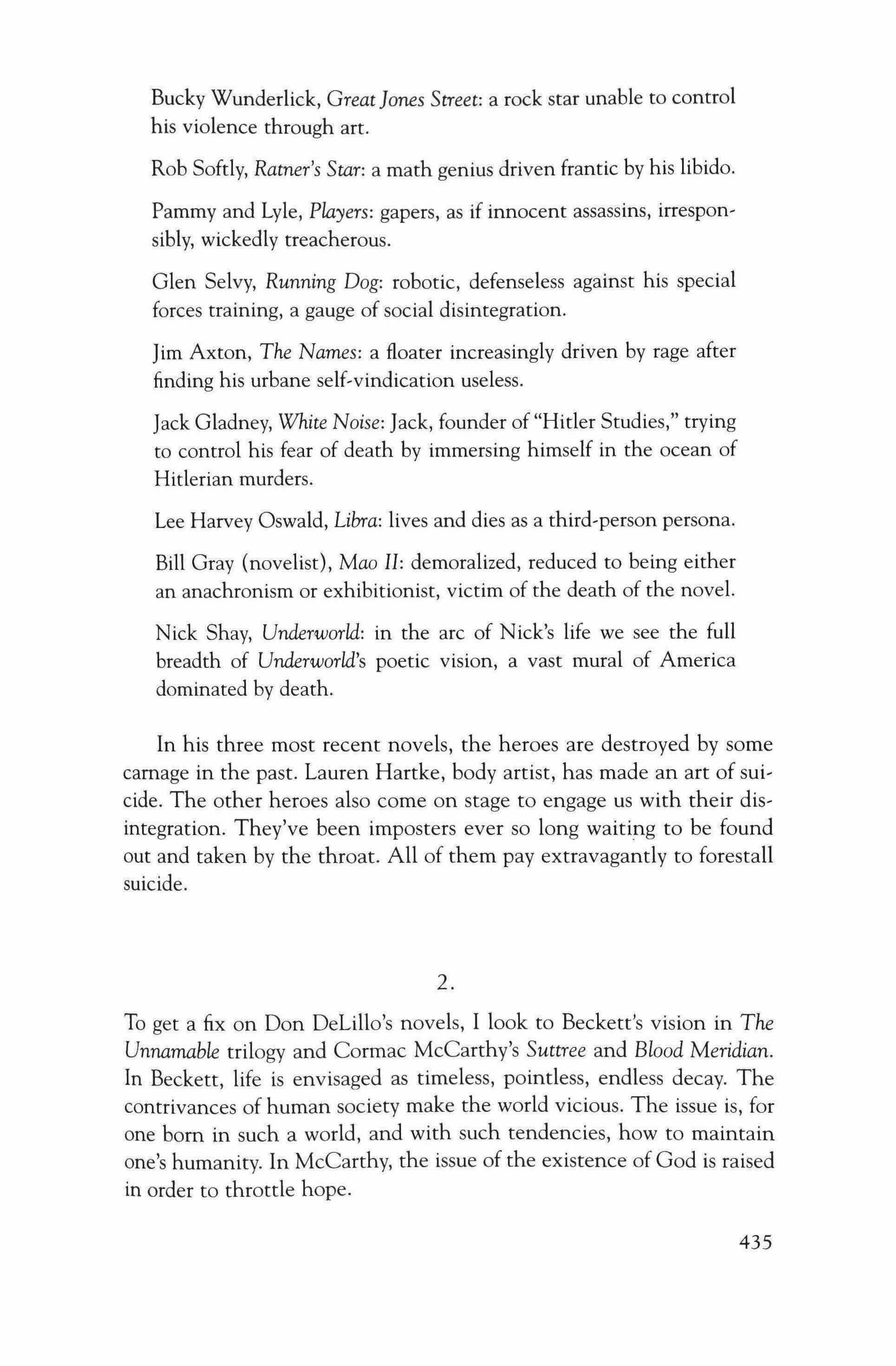
To get a fix on Don Delillo's novels, I look to Beckett's vision in The Unnamable trilogy and Cormac McCarthy's Suttree and Blood Meridian. In Beckett, life is envisaged as timeless, pointless, endless decay. The contrivances of human society make the world vicious. The issue is, for one born in such a world, and with such tendencies, how to maintain one's humanity. In McCarthy, the issue of the existence of God is raised in order to throttle hope.
2.
435
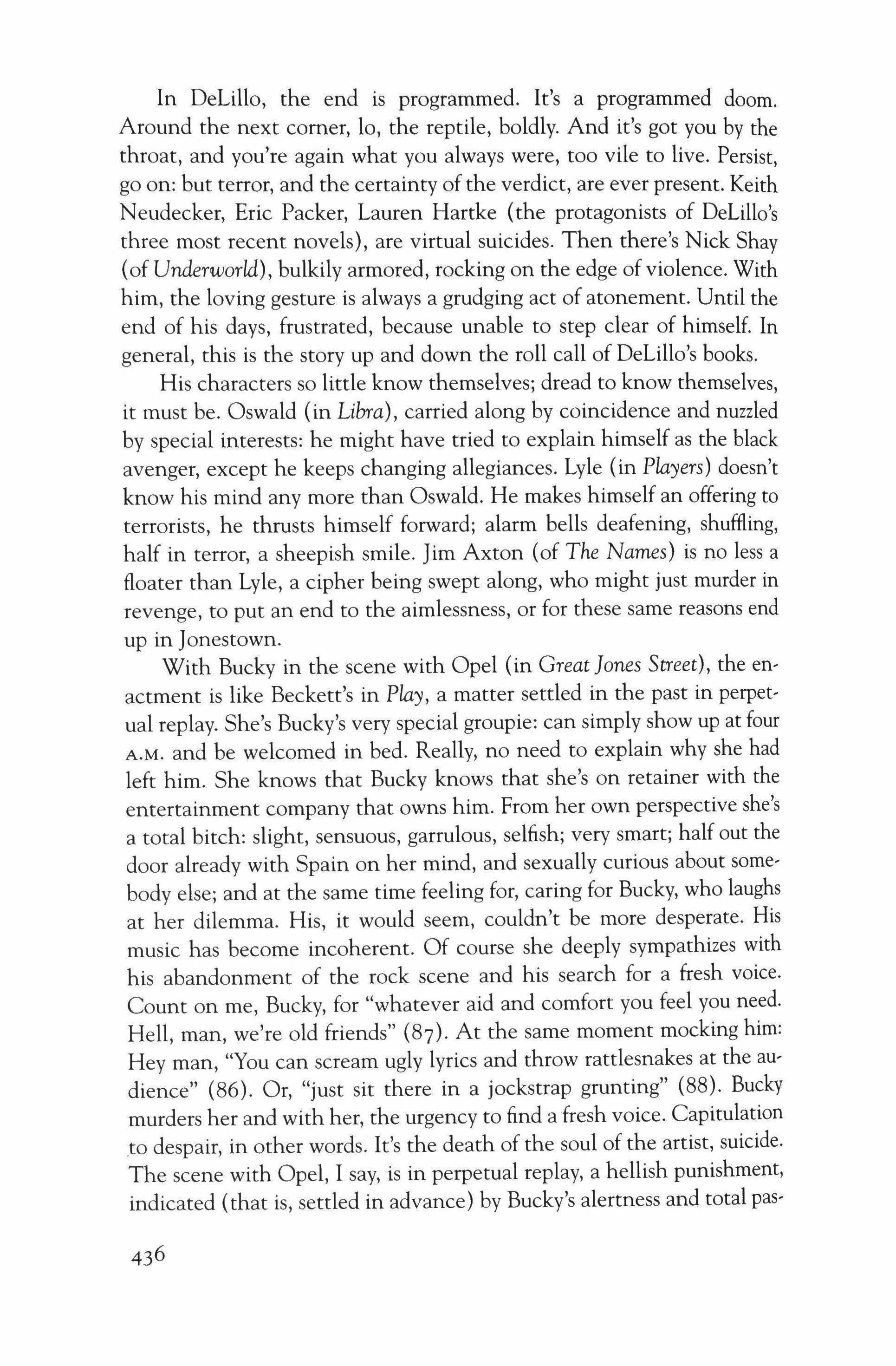
In Delillo, the end is programmed. It's a programmed doom. Around the next corner, 10, the reptile, boldly. And it's got you by the throat, and you're again what you always were, too vile to live. Persist, go on: but terror, and the certainty of the verdict, are ever present. Keith Neudecker, Eric Packer, lauren Hartke (the protagonists of Delillo's three most recent novels), are virtual suicides. Then there's Nick Shay (of Underworld), bulkily armored, rocking on the edge ofviolence. With him, the loving gesture is always a grudging act of atonement. Until the end of his days, frustrated, because unable to step clear of himself. In general, this is the story up and down the roll call of Delillo's books.
His characters so little know themselves; dread to know themselves, it must be. Oswald (in Libra), carried along by coincidence and nuzzled by special interests: he might have tried to explain himself as the black avenger, except he keeps changing allegiances. lyle (in Players) doesn't know his mind any more than Oswald. He makes himself an offering to terrorists, he thrusts himself forward; alarm bells deafening, shuffling, half in terror, a sheepish smile. Jim Axton (of The Names) is no less a floater than lyle, a cipher being swept along, who might just murder in revenge, to put an end to the aimlessness, or for these same reasons end up in Jonestown.
With Bucky in the scene with Opel (in Great Jones Street), the enactment is like Beckett's in Play, a matter settled in the past in perpetual replay. She's Bucky's very special groupie: can simply show up at four A.M. and be welcomed in bed. Really, no need to explain why she had left him. She knows that Bucky knows that she's on retainer with the entertainment company that owns him. From her own perspective she's a total bitch: slight, sensuous, garrulous, selfish; very smart; half out the door already with Spain on her mind, and sexually curious about somebody else; and at the same time feeling for, caring for Bucky, who laughs at her dilemma. His, it would seem, couldn't be more desperate. His music has become incoherent. Of course she deeply sympathizes with his abandonment of the rock scene and his search for a fresh voice. Count on me, Bucky, for "whatever aid and comfort you feel you need. Hell, man, we're old friends" (87). At the same moment mocking him: Hey man, "You can scream ugly lyrics and throw rattlesnakes at the audience" (86). Or, "just sit there in a jockstrap grunting" (88). Bucky murders her and with her, the urgency to find a fresh voice. Capitulation to despair, in other words. It's the death of the soul of the artist, suicide. The scene with Opel, I say, is in perpetual replay, a hellish punishment, indicated (that is, settled in advance) by Bucky's alertness and total pas-
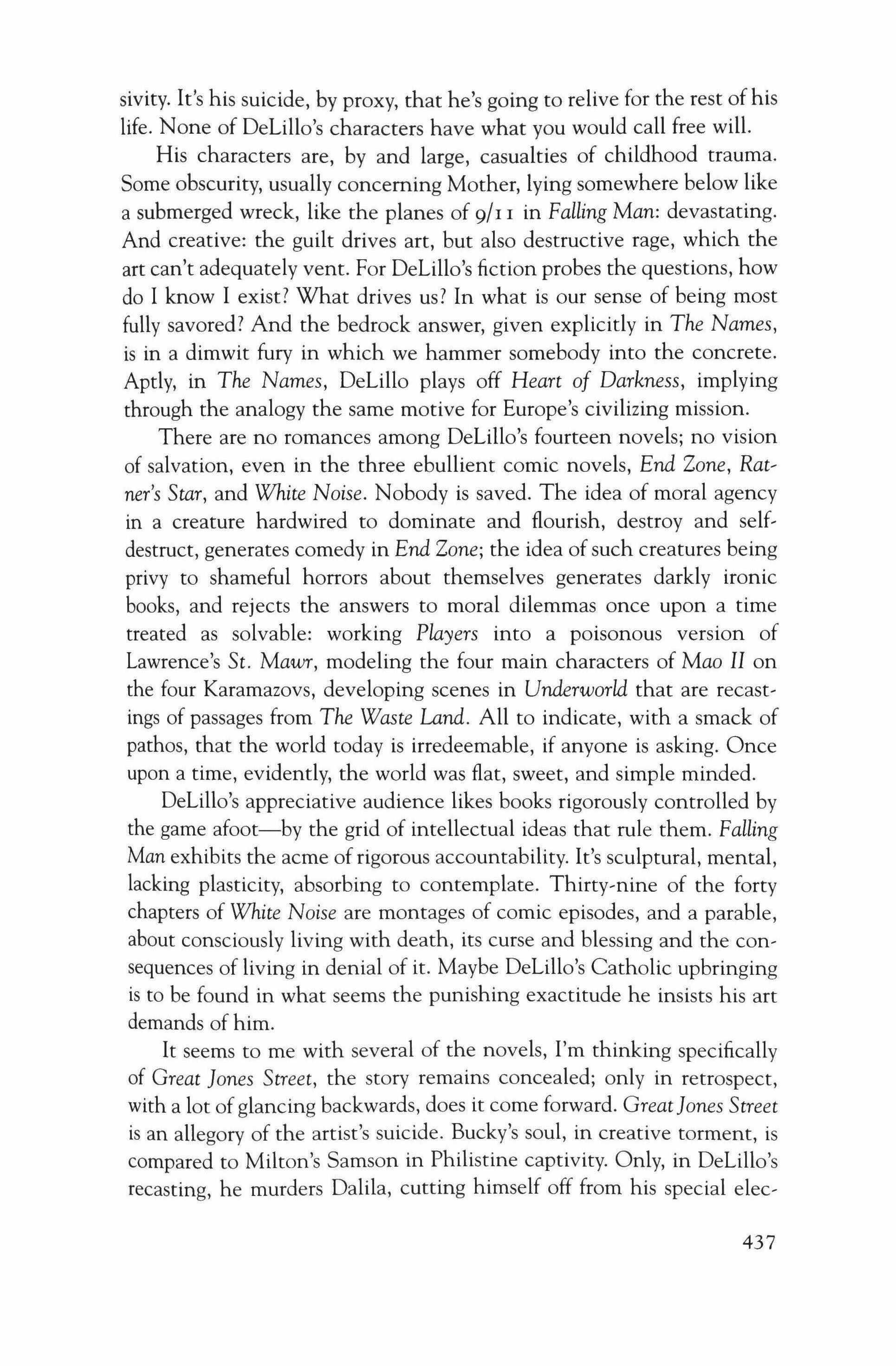
sivity. It's his suicide, by proxy, that he's going to relive for the rest of his life. None of Delillo's characters have what you would call free will.
His characters are, by and large, casualties of childhood trauma. Some obscurity, usually concerning Mother, lying somewhere below like a submerged wreck, like the planes of 9/1 I in Falling Man: devastating. And creative: the guilt drives art, but also destructive rage, which the art can't adequately vent. For Delillo's fiction probes the questions, how do I know I exist? What drives us? In what is our sense of being most fully savored? And the bedrock answer, given explicitly in The Names, is in a dimwit fury in which we hammer somebody into the concrete. Aptly, in The Names, Delillo plays off Heart of Darkness, implying through the analogy the same motive for Europe's civilizing mission.
There are no romances among Delillo's fourteen novels; no vision of salvation, even in the three ebullient comic novels, End Zone, Rat� ner's Star, and White Noise. Nobody is saved. The idea of moral agency in a creature hardwired to dominate and flourish, destroy and selfdestruct, generates comedy in End Zone; the idea of such creatures being privy to shameful horrors about themselves generates darkly ironic books, and rejects the answers to moral dilemmas once upon a time treated as solvable: working Players into a poisonous version of Lawrence's St. Mawr, modeling the four main characters of Mao II on the four Karamazovs, developing scenes in Underworld that are recastings of passages from The Waste Land. All to indicate, with a smack of pathos, that the world today is irredeemable, if anyone is asking. Once upon a time, evidently, the world was flat, sweet, and simple minded.
Delillo's appreciative audience likes books rigorously controlled by the game afoot-by the grid of intellectual ideas that rule them. Falling Man exhibits the acme ofrigorous accountability. It's sculptural, mental, lacking plasticity, absorbing to contemplate. Thirty-nine of the forty chapters of White Noise are montages of comic episodes, and a parable, about consciously living with death, its curse and blessing and the consequences of living in denial of it. Maybe Delillo's Catholic upbringing is to be found in what seems the punishing exactitude he insists his art demands of him.
It seems to me with several of the novels, I'm thinking specifically of Great Jones Street, the story remains concealed; only in retrospect, with a lot of glancing backwards, does it come forward. Great}ones Street is an allegory of the artist's suicide. Bucky's soul, in creative torment, is compared to Milton's Samson in Philistine captivity. Only, in Delillo's recasting, he murders Dalila, cutting himself off from his special elec-
437
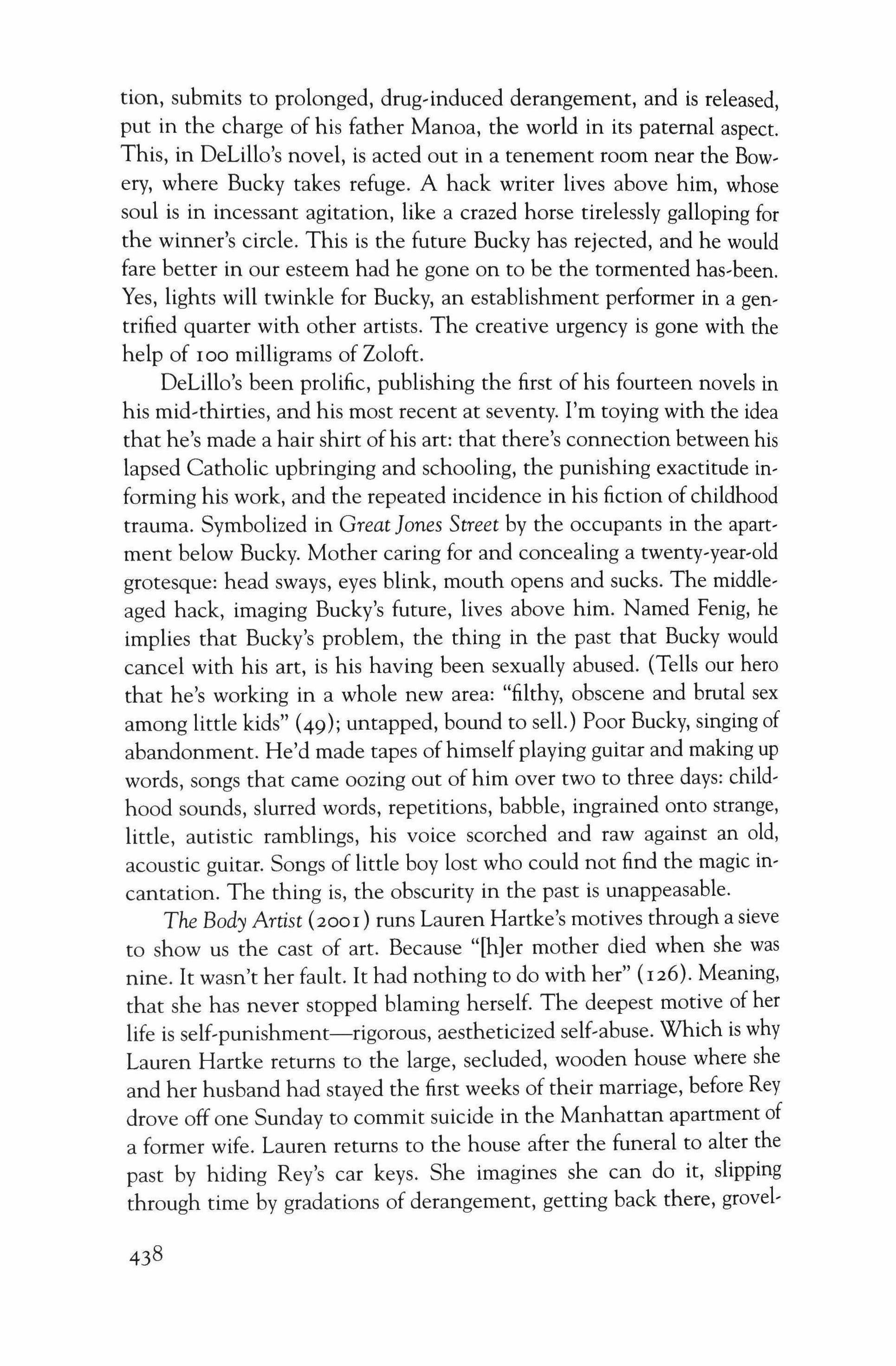
tion, submits to prolonged, drug-induced derangement, and is released, put in the charge of his father Manoa, the world in its paternal aspect. This, in Delillo's novel, is acted out in a tenement room near the Bowery, where Bucky takes refuge. A hack writer lives above him, whose soul is in incessant agitation, like a crazed horse tirelessly galloping for the winner's circle. This is the future Bucky has rejected, and he would fare better in our esteem had he gone on to be the tormented has-been. Yes, lights will twinkle for Bucky, an establishment performer in a gentrified quarter with other artists. The creative urgency is gone with the help of 100 milligrams of Zoloft.
Delillo's been prolific, publishing the first of his fourteen novels in his mid-thirties, and his most recent at seventy. I'm toying with the idea that he's made a hair shirt ofhis art: that there's connection between his lapsed Catholic upbringing and schooling, the punishing exactitude informing his work, and the repeated incidence in his fiction of childhood trauma. Symbolized in Great Jones Street by the occupants in the apartment below Bucky. Mother caring for and concealing a twenty-year-old grotesque: head sways, eyes blink, mouth opens and sucks. The middleaged hack, imaging Bucky's future, lives above him. Named Fenig, he implies that Bucky's problem, the thing in the past that Bucky would cancel with his art, is his having been sexually abused. (Tells our hero that he's working in a whole new area: "filthy, obscene and brutal sex among little kids" (49); untapped, bound to sell.) Poor Bucky, singing of abandonment. He'd made tapes ofhimself playing guitar and making up words, songs that came oozing out of him over two to three days: childhood sounds, slurred words, repetitions, babble, ingrained onto strange, little, autistic ramblings, his voice scorched and raw against an old, acoustic guitar. Songs of little boy lost who could not find the magic incantation. The thing is, the obscurity in the past is unappeasable.
The Body Artist (2001) runs Lauren Hartke's motives through a sieve to show us the cast of art. Because "[h]er mother died when she was nine. It wasn't her fault. It had nothing to do with her" (126). Meaning, that she has never stopped blaming herself. The deepest motive of her life is self-punishment-rigorous, aestheticized self-abuse. Which is why Lauren Hartke returns to the large, secluded, wooden house where she and her husband had stayed the first weeks of their marriage, before Rey drove off one Sunday to commit suicide in the Manhattan apartment of a former wife. Lauren returns to the house after the funeral to alter the past by hiding Rey's car keys. She imagines she can do it, slipping through time by gradations of derangement, getting back there, grovel-
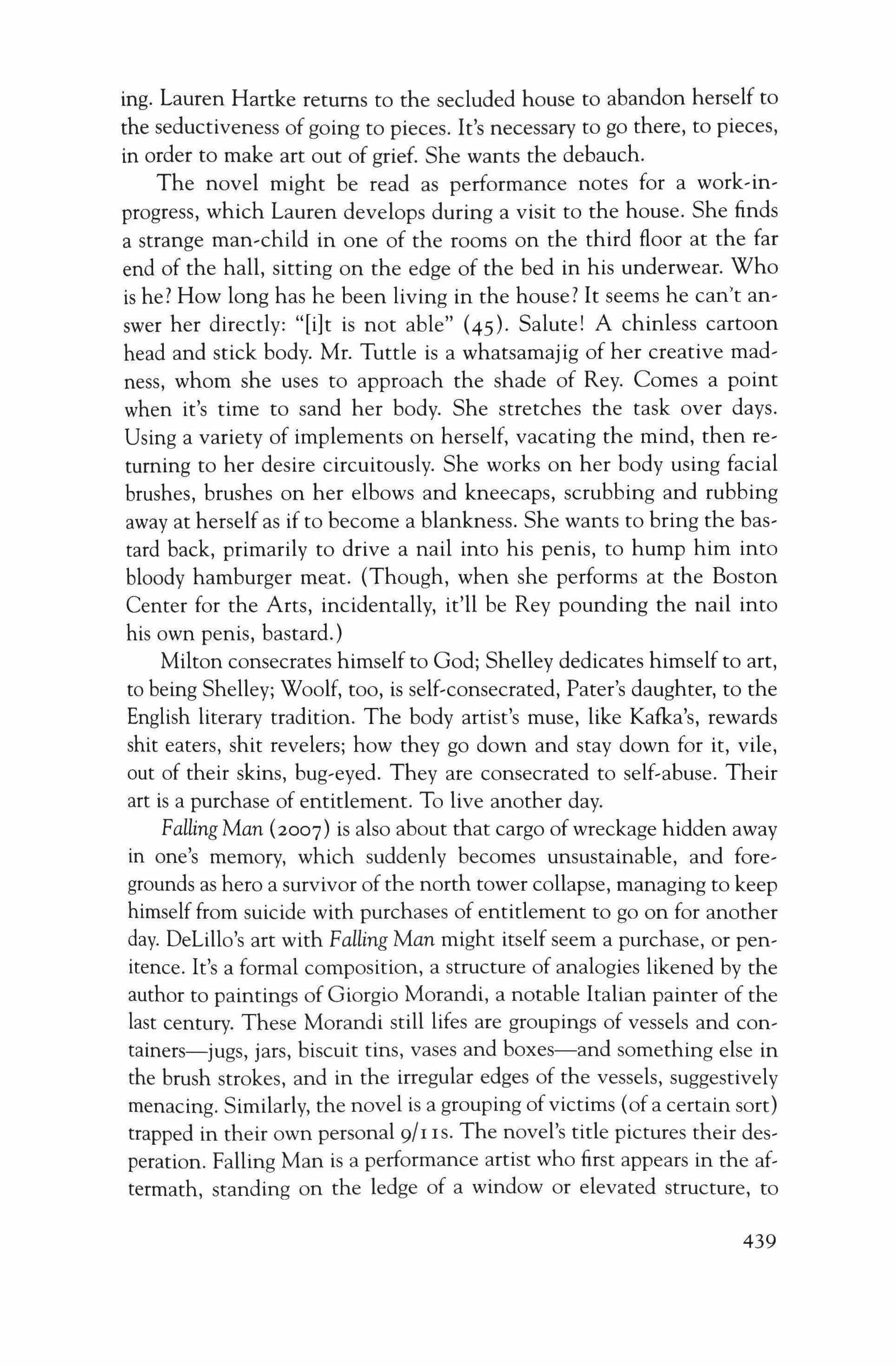
ing. Lauren Hartke returns to the secluded house to abandon herself to the seductiveness of going to pieces. It's necessary to go there, to pieces, in order to make art out of grief. She wants the debauch.
The novel might be read as performance notes for a work-inprogress, which Lauren develops during a visit to the house. She finds a strange man-child in one of the rooms on the third floor at the far end of the hall, sitting on the edge of the bed in his underwear. Who is he? How long has he been living in the house? It seems he can't answer her directly: "[i]t is not able" (45). Salute! A chinless cartoon head and stick body. Mr. Tuttle is a whatsamajig of her creative madness, whom she uses to approach the shade of Rey. Comes a point when it's time to sand her body. She stretches the task over days. Using a variety of implements on herself, vacating the mind, then returning to her desire circuitously. She works on her body using facial brushes, brushes on her elbows and kneecaps, scrubbing and rubbing away at herself as if to become a blankness. She wants to bring the bastard back, primarily to drive a nail into his penis, to hump him into bloody hamburger meat. (Though, when she performs at the Boston Center for the Arts, incidentally, it'll be Rey pounding the nail into his own penis, bastard.)
Milton consecrates himself to God; Shelley dedicates himself to art, to being Shelley; Woolf, too, is self-consecrated, Pater's daughter, to the English literary tradition. The body artist's muse, like Kafka's, rewards shit eaters, shit revelers; how they go down and stay down for it, vile, out of their skins, bug-eyed. They are consecrated to self-abuse. Their art is a purchase of entitlement. To live another day.
Falling Man (20°7) is also about that cargo of wreckage hidden away in one's memory, which suddenly becomes unsustainable, and foregrounds as hero a survivor of the north tower collapse, managing to keep himself from suicide with purchases of entitlement to go on for another day. Delillo's art with Falling Man might itself seem a purchase, or penitence. It's a formal composition, a structure of analogies likened by the author to paintings of Giorgio Morandi, a notable Italian painter of the last century. These Morandi still lifes are groupings of vessels and containers-jugs, jars, biscuit tins, vases and boxes-and something else in the brush strokes, and in the irregular edges of the vessels, suggestively menacing. Similarly, the novel is a grouping of victims (of a certain sort) trapped in their own personal 9/1 IS. The novel's title pictures their desperation. Falling Man is a performance artist who first appears in the aftermath, standing on the ledge of a window or elevated structure, to
439
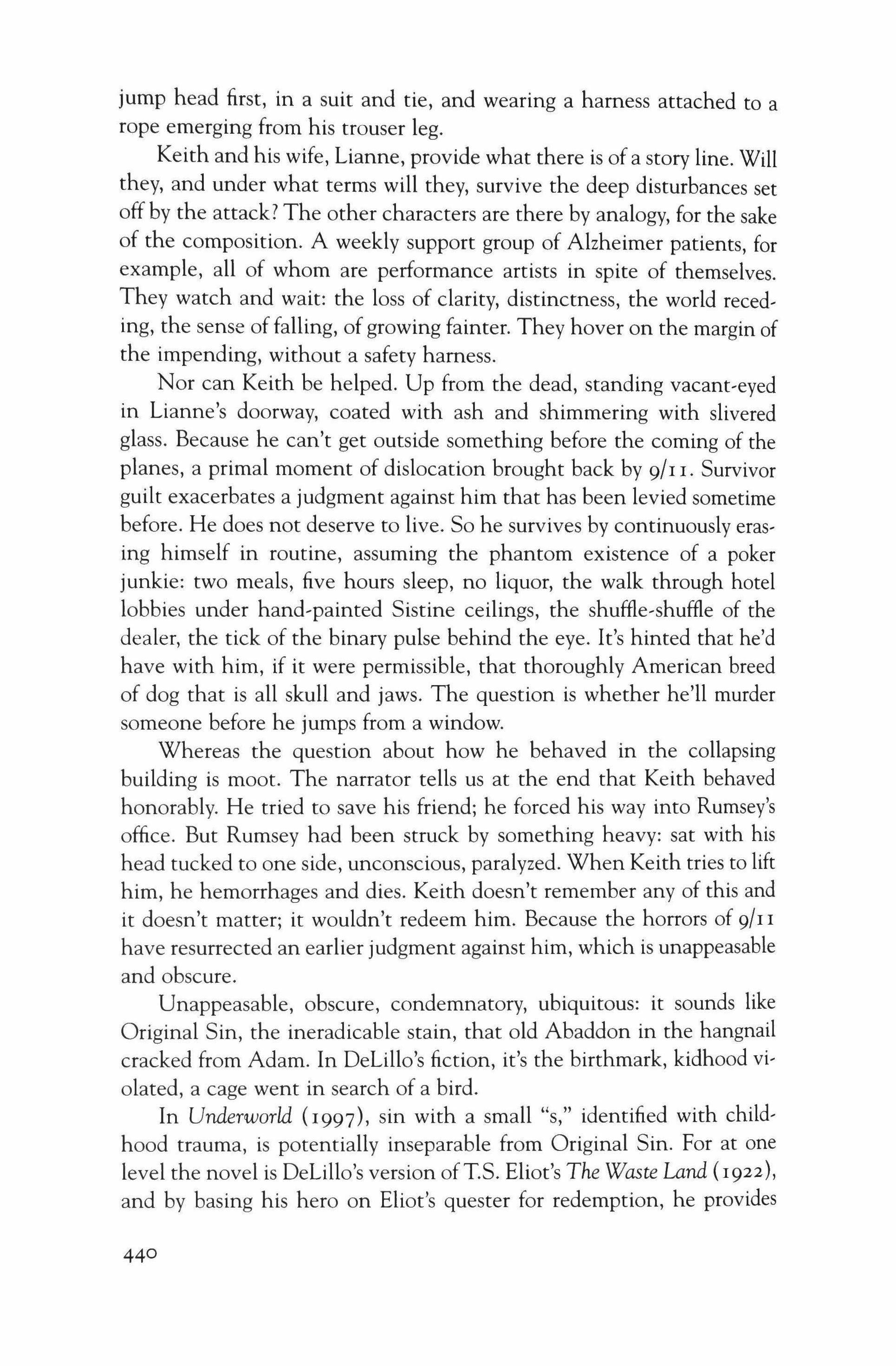
jump head first, in a suit and tie, and wearing a harness attached to a rope emerging from his trouser leg.
Keith and his wife, Lianne, provide what there is of a story line. Will they, and under what terms will they, survive the deep disturbances set off by the attack? The other characters are there by analogy, for the sake of the composition. A weekly support group of Alzheimer patients, for example, all of whom are performance artists in spite of themselves. They watch and wait: the loss of clarity, distinctness, the world receding, the sense of falling, of growing fainter. They hover on the margin of the impending, without a safety harness.
Nor can Keith be helped. Up from the dead, standing vacant-eyed in Lianne's doorway, coated with ash and shimmering with slivered glass. Because he can't get outside something before the coming of the planes, a primal moment of dislocation brought back by 9/II. Survivor guilt exacerbates a judgment against him that has been levied sometime before. He does not deserve to live. So he survives by continuously erasing himself in routine, assuming the phantom existence of a poker junkie: two meals, five hours sleep, no liquor, the walk through hotel lobbies under hand-painted Sistine ceilings, the shuffle-shuffle of the dealer, the tick of the binary pulse behind the eye. It's hinted that he'd have with him, if it were permissible, that thoroughly American breed of dog that is all skull and jaws. The question is whether he'll murder someone before he jumps from a window.
Whereas the question about how he behaved in the collapsing building is moot. The narrator tells us at the end that Keith behaved honorably. He tried to save his friend; he forced his way into Rumsey's office. But Rumsey had been struck by something heavy: sat with his head tucked to one side, unconscious, paralyzed. When Keith tries to lift him, he hemorrhages and dies. Keith doesn't remember any of this and it doesn't matter; it wouldn't redeem him. Because the horrors of 9/II have resurrected an earlier judgment against him, which is unappeasable and obscure.
Unappeasable, obscure, condemnatory, ubiquitous: it sounds like Original Sin, the ineradicable stain, that old Abaddon in the hangnail cracked from Adam. In Delillo's fiction, it's the birthmark, kidhood violated, a cage went in search of a bird.
In Underworld (1997), sin with a small "s," identified with childhood trauma, is potentially inseparable from Original Sin. For at one level the novel is Delillo's version ofT.S. Eliot's The Waste Land (1922), and by basing his hero on Eliot's quester for redemption, he provides
440

himself with a test, maybe even a sincere one-to see how far he can go with the faith,based stance of the poem, listening for amplification within himself. The novel crisscrosses a span of forty years, opening on a famous baseball game between the Giants and the Dodgers, October 3,1951, which the Giants win in the last inning on a walk-offhome run blasted by Bobby Thomson. Russia's testing of an atomic bomb that same day, launching the Cold War, is the twin event of the naive uproar set off by Thomson. Nick is seventeen.
Nick is eleven, growing up in an Italian neighborhood in the Bronx, with a devout, Catholic mother, brainy younger brother, and petty crook for father, when his father mysteriously disappears. Nick is seven, teen when he kills a man for reasons forever obscure to him. He's away two and a half years at reform school, part of the time at a Jesuit facility. For a time he remains under their sway. Mother and brother refer to him as the Jesuit. At thirty-four he gets married. At fiftv-seven, 1991, which is time-present in the novel, Nick is a high corporate officer in a Phoenix waste management firm. He's a husband and father to two children, vaguely.
By choosing The Waste Land as a framework, Delillo has set up a quest for faith, which he carries forward, Nick never far from the center, by echoes and resonances from the poem. Two thirds of the way through the novel the quest is dropped. Eliot disappears or is far less heard. (Drip drop, like those rivers of central Asia, the Syr and Amu Darya, sinking into the steppe, no delta, scarcely any mud.) Up to that point, Nick is evoked continuously by characters representing his plight, amplified by Eliot.
Nick's plight is just about insurmountable. By shooting George Manza, he proves to be the spitting image of his father: like his father, abandoning the family, forever irremediably typed, known, screwedlike Ralph Branca, number thirteen for the Brooklyn Dodgers, who was struck by fate likewise when pitching Thomson that home run ball.
Identifying with Branca, Nick spends big money to own the ball. How do you get out fro� under that? Compounded by years (from the time he was eleven) infinitely preferring and wishing his father murdered rather than the heartless bastard who walked out on the family. Eliot's poem amplifies and adumbrates Nick's condition, keeping him central. And it also is the sound of the implied narrator's musings.
That fixed moment in the past, Branca pitching to Thomson, Nick's father abandoning the family and Nick pulling the trigger, is represented by the camcorder tape of the man who is caught at the moment he is
441
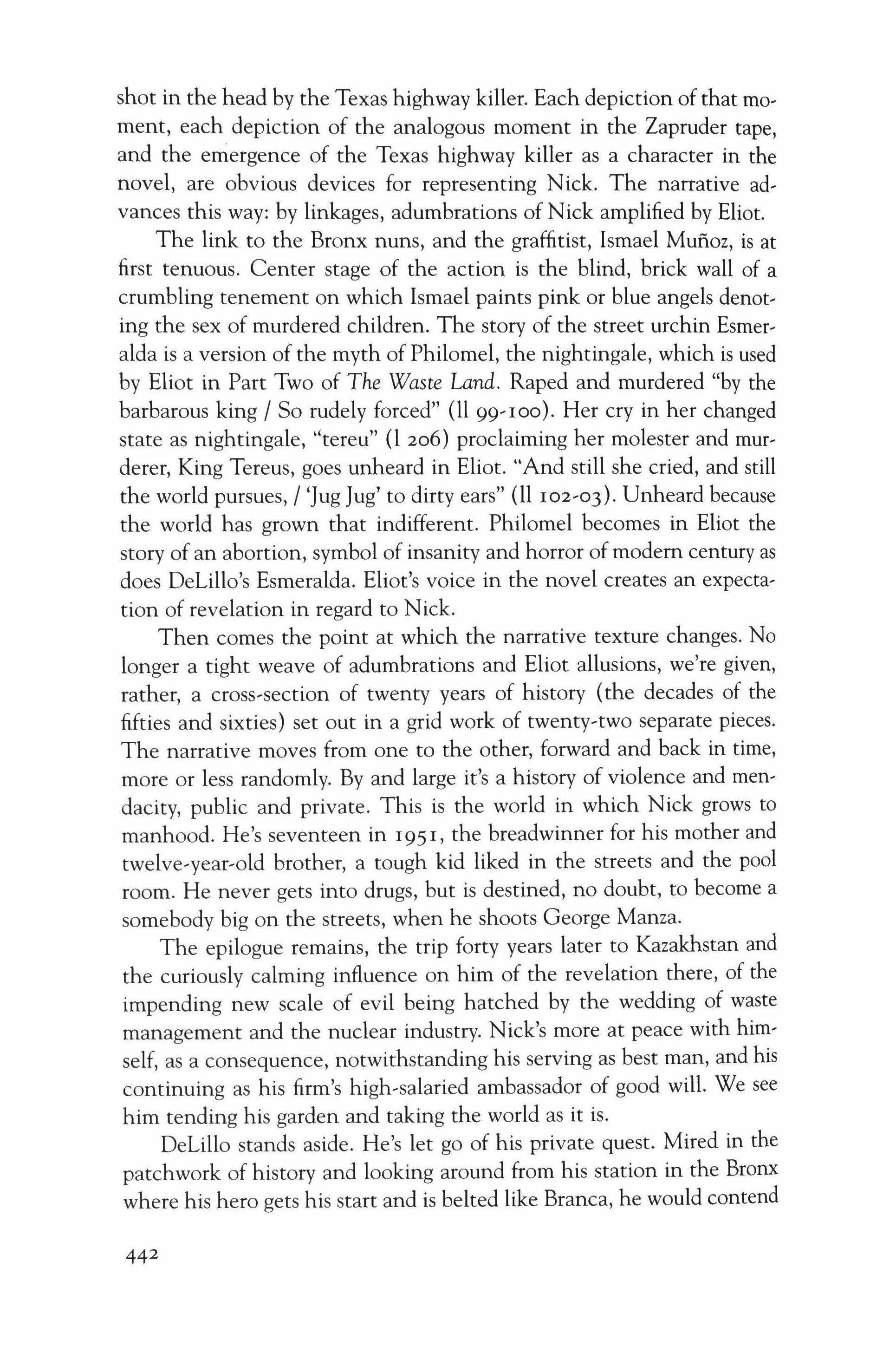
shot in the head by the Texas highway killer. Each depiction ofthat moment, each depiction of the analogous moment in the Zapruder tape, and the emergence of the Texas highway killer as a character in the novel, are obvious devices for representing Nick. The narrative advances this way: by linkages, adumbrations of Nick amplified by Eliot. The link to the Bronx nuns, and the graffitist, Ismael Munoz, is at first tenuous. Center stage of the action is the blind, brick wall of a crumbling tenement on which Ismael paints pink or blue angels denoting the sex of murdered children. The story of the street urchin Esmeralda is a version of the myth of Philomel, the nightingale, which is used by Eliot in Part Two of The Waste Land. Raped and murdered "by the barbarous king / So rudely forced" (11 99-100). Her cry in her changed state as nightingale, "tereu" (l 206) proclaiming her molester and murderer, King Tereus, goes unheard in Eliot. "And still she cried, and still the world pursues, / 'Jug Jug' to dirty ears" (11 102-03). Unheard because the world has grown that indifferent. Philomel becomes in Eliot the story of an abortion, symbol of insanity and horror of modem century as does Delillo's Esmeralda. Eliot's voice in the novel creates an expectation of revelation in regard to Nick.
Then comes the point at which the narrative texture changes. No longer a tight weave of adumbrations and Eliot allusions, we're given, rather, a cross-section of twenty years of history (the decades of the fifties and sixties) set out in a grid work of twenty-two separate pieces. The narrative moves from one to the other, forward and back in time, more or less randomly. By and large it's a history of violence and mendacity, public and private. This is the world in which Nick grows to manhood. He's seventeen in 1951, the breadwinner for his mother and twelve-year-old brother, a tough kid liked in the streets and the pool room. He never gets into drugs, but is destined, no doubt, to become a somebody big on the streets, when he shoots George Mama.
The epilogue remains, the trip forty years later to Kazakhstan and the curiously calming influence on him of the revelation there, of the impending new scale of evil being hatched by the wedding of waste management and the nuclear industry. Nick's more at peace with himself, as a consequence, notwithstanding his serving as best man, and his continuing as his firm's high-salaried ambassador of good will. We see him tending his garden and taking the world as it is.
Delillo stands aside. He's let go of his private quest. Mired in the patchwork of history and looking around from his station in the Bronx where his hero gets his start and is belted like Branca, he would contend
442
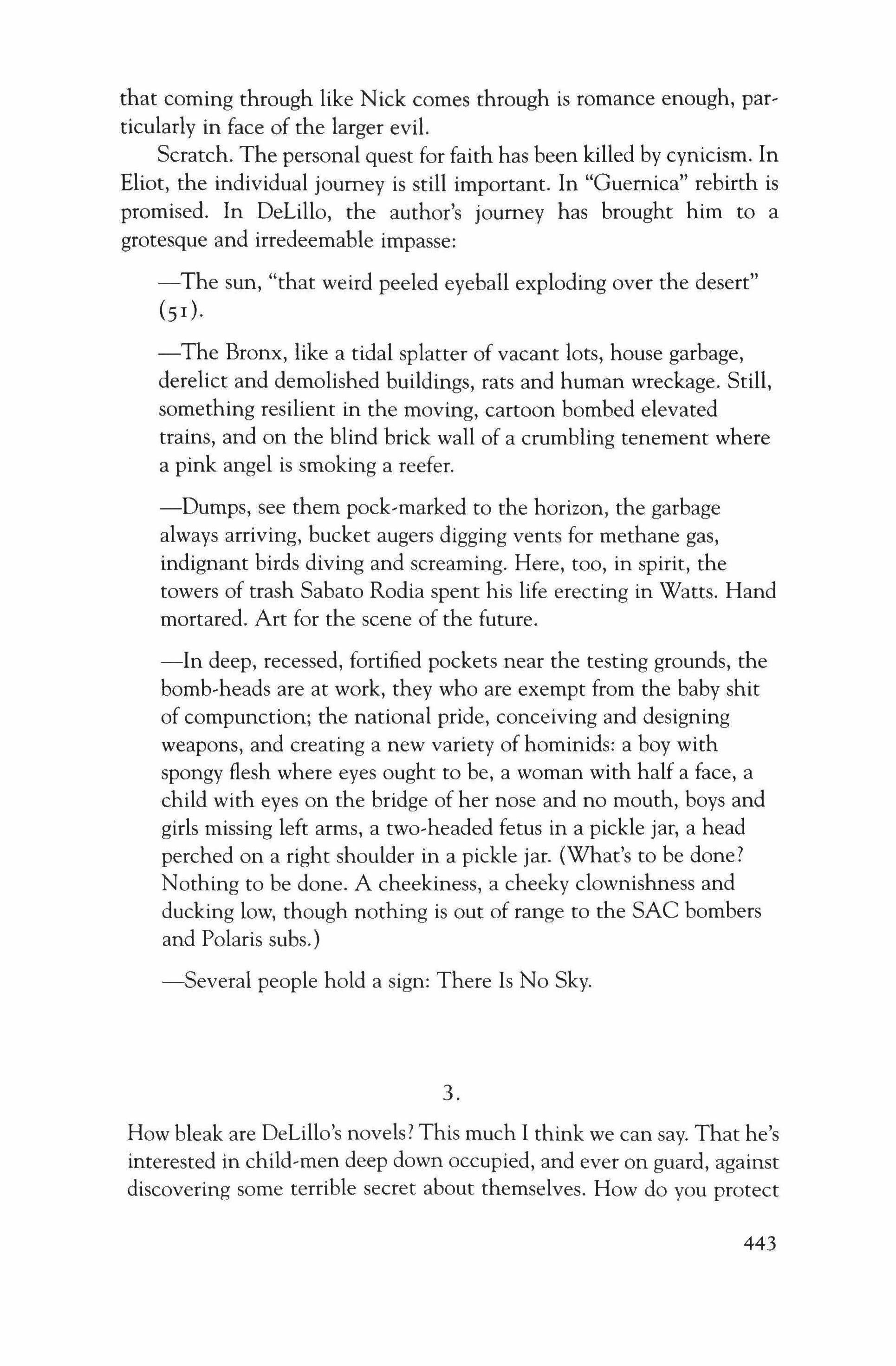
that coming through like Nick comes through is romance enough, par, ticularly in face of the larger evil.
Scratch. The personal quest for faith has been killed by cynicism. In Eliot, the individual journey is still important. In "Guernica" rebirth is promised. In Delillo, the author's journey has brought him to a grotesque and irredeemable impasse:
-The sun, "that weird peeled eyeball exploding over the desert" (51).
-The Bronx, like a tidal splatter of vacant lots, house garbage, derelict and demolished buildings, rats and human wreckage. Still, something resilient in the moving, cartoon bombed elevated trains, and on the blind brick wall of a crumbling tenement where a pink angel is smoking a reefer.
-Dumps, see them pock,marked to the horizon, the garbage always arriving, bucket augers digging vents for methane gas, indignant birds diving and screaming. Here, too, in spirit, the towers of trash Sabato Rodia spent his life erecting in Watts. Hand mortared. Art for the scene of the future.
-In deep, recessed, fortified pockets near the testing grounds, the bomb,heads are at work, they who are exempt from the baby shit of compunction; the national pride, conceiving and designing weapons, and creating a new variety of hominids: a boy with spongy flesh where eyes ought to be, a woman with half a face, a child with eyes on the bridge of her nose and no mouth, boys and girls missing left arms, a two-headed fetus in a pickle jar, a head perched on a right shoulder in a pickle jar. (What's to be done? Nothing to be done. A cheekiness, a cheeky clownishness and ducking low, though nothing is out of range to the SAC bombers and Polaris subs.)
-Several people hold a sign: There Is No Sky. 3.
How bleak are Delillo's novels? This much I think we can say. That he's interested in child-men deep down occupied, and ever on guard, against discovering some terrible secret about themselves. How do you protect
443
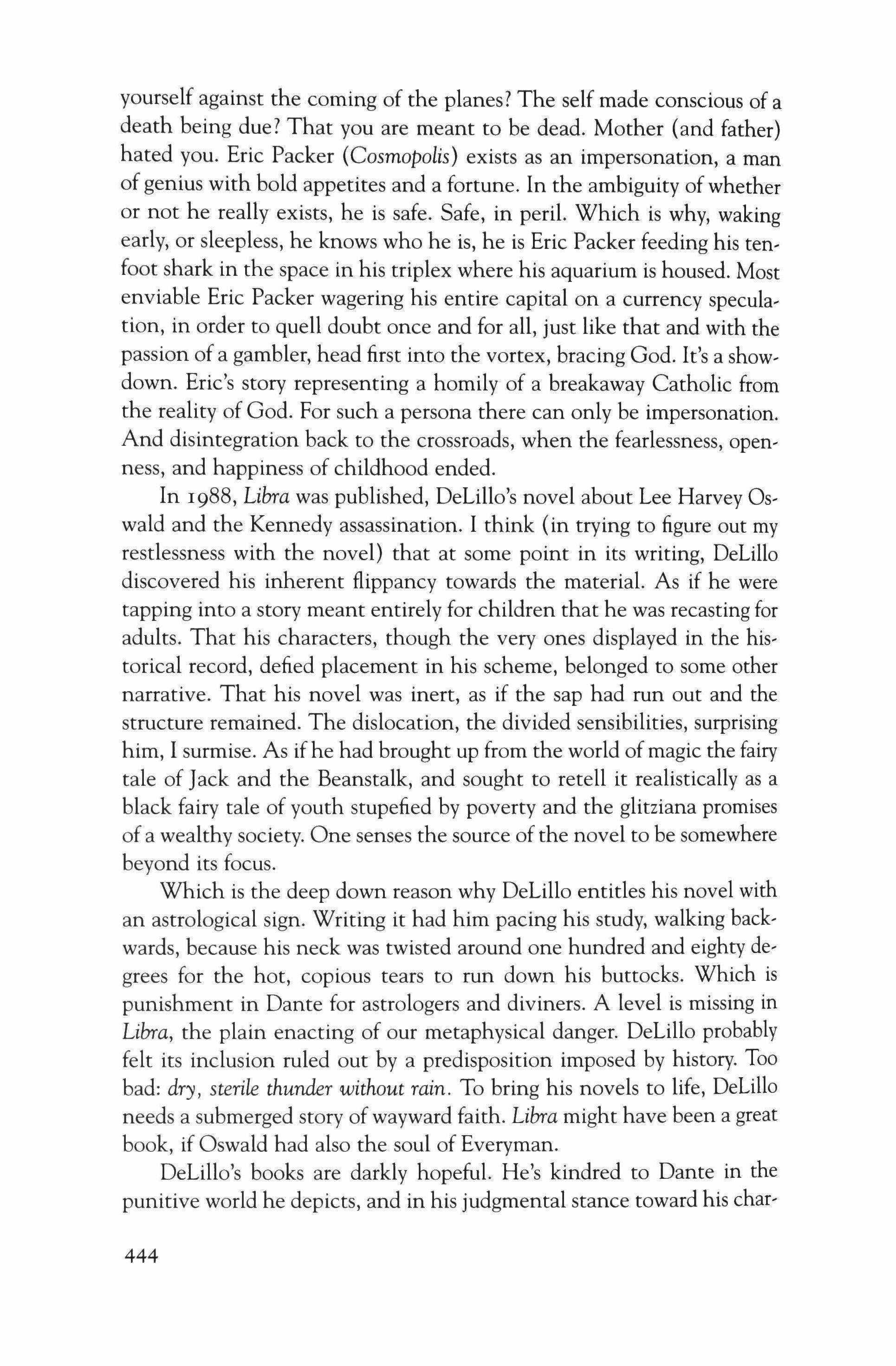
yourself against the coming of the planes? The self made conscious of a death being due? That you are meant to be dead. Mother (and father) hated you. Eric Packer (Cosmopolis) exists as an impersonation, a man of genius with bold appetites and a fortune. In the ambiguity of whether or not he really exists, he is safe. Safe, in peril. Which is why, waking early, or sleepless, he knows who he is, he is Eric Packer feeding his tenfoot shark in the space in his triplex where his aquarium is housed. Most enviable Eric Packer wagering his entire capital on a currency speculation, in order to quell doubt once and for all, just like that and with the passion of a gambler, head first into the vortex, bracing God. It's a showdown. Eric's story representing a homily of a breakaway Catholic from the reality of God. For such a persona there can only be impersonation. And disintegration back to the crossroads, when the fearlessness, openness, and happiness of childhood ended.
In 1988, Libra was published, Delillo's novel about Lee Harvey Oswald and the Kennedy assassination. I think (in trying to figure out my restlessness with the novel) that at some point in its writing, Delillo discovered his inherent flippancy towards the material. As if he were tapping into a story meant entirely for children that he was recasting for adults. That his characters, though the very ones displayed in the historical record, defied placement in his scheme, belonged to some other narrative. That his novel was inert, as if the sap had run out and the structure remained. The dislocation, the divided sensibilities, surprising him, I surmise. As ifhe had brought up from the world of magic the fairy tale of Jack and the Beanstalk, and sought to retell it realistically as a black fairy tale of youth stupefied by poverty and the glitziana promises of a wealthy society. One senses the source of the novel to be somewhere beyond its focus.
Which is the deep down reason why Delillo entitles his novel with an astrological sign. Writing it had him pacing his study, walking backwards, because his neck was twisted around one hundred and eighty degrees for the hot, copious tears to run down his buttocks. Which is punishment in Dante for astrologers and diviners. A level is missing in Libra, the plain enacting of our metaphysical danger. Delillo probably felt its inclusion ruled out by a predisposition imposed by history. Too bad: dry, sterile thunder without rain. To bring his novels to life, Delillo needs a submerged story ofwayward faith. Libra might have been a great book, if Oswald had also the soul of Everyman.
Delillo's books are darkly hopeful. He's kindred to Dante in the punitive world he depicts, and in his judgmental stance toward his char-
444
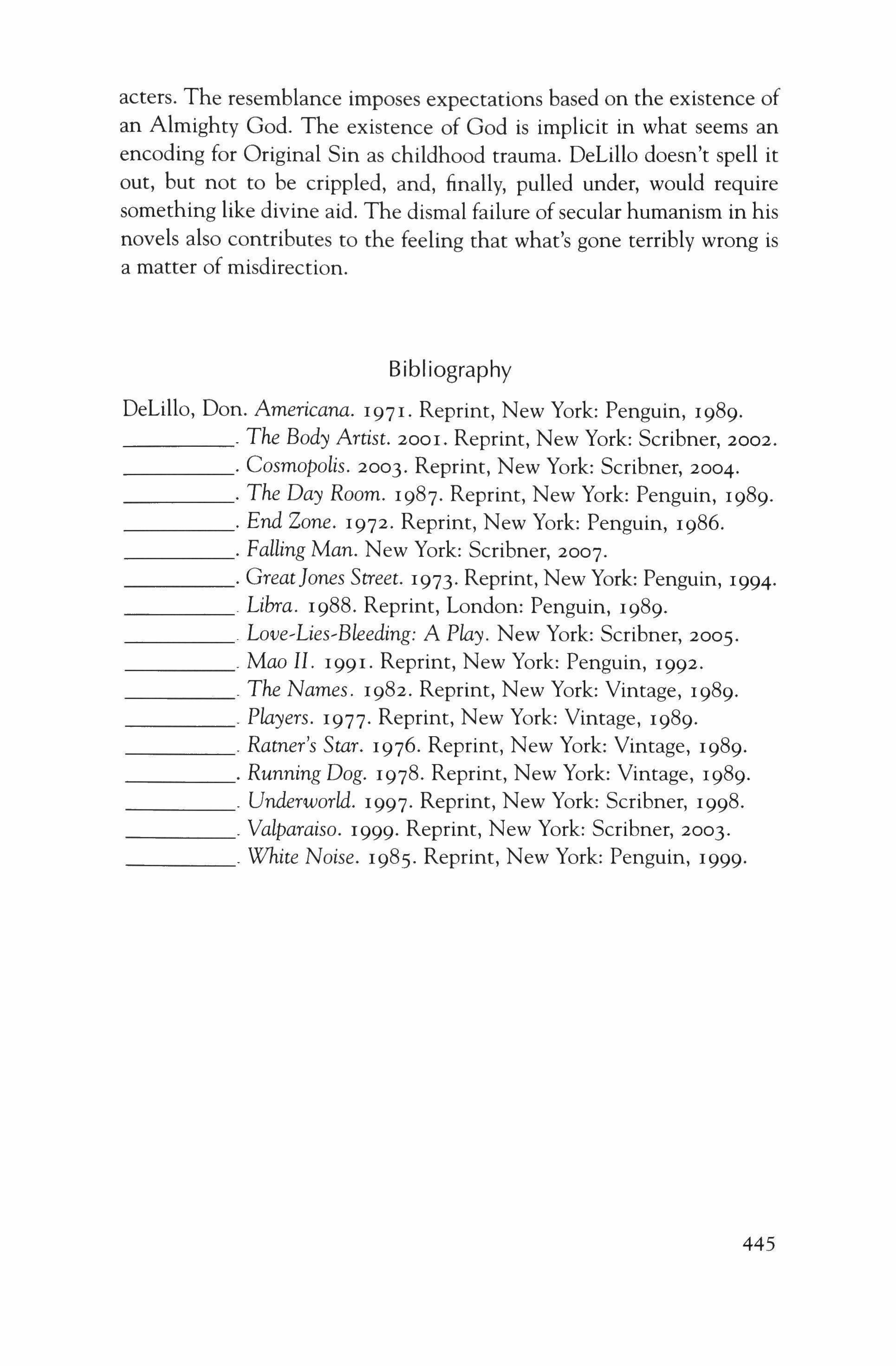
acters. The resemblance imposes expectations based on the existence of an Almighty God. The existence of God is implicit in what seems an encoding for Original Sin as childhood trauma. Delillo doesn't spell it out, but not to be crippled, and, finally, pulled under, would require something like divine aid. The dismal failure of secular humanism in his novels also contributes to the feeling that what's gone terribly wrong is a matter of misdirection.
Bibliography
Delillo, Don. Americana. 1971. Reprint, New York: Penguin, 1989. - The Body Artist. 2001. Reprint, New York: Scribner, 2002. Cosmopolis. 2003. Reprint, New York: Scribner, 2004. The Day Room. 1987. Reprint, New York: Penguin, 1989.
- End Zone. 1972. Reprint, New York: Penguin, 1986Falling Man. New York: Scribner, 2007. Great}ones Street. 1973. Reprint, New York: Penguin, 1994· Libra. 1988. Reprint, London: Penguin, 1989. Love�Lies�Bleeding: A Play. New York: Scribner, 2005.
- Mao II_ 1991. Reprint, New York: Penguin, 1992.
- The Names. 1982. Reprint, New York: Vintage, 1989. - Players. 1977. Reprint, New York: Vintage, 1989.
- Ratner's Star. 1976. Reprint, New York: Vintage, 1989. Running Dog. 1978. Reprint, New York: Vintage, 1989.
- Underworld. 1997. Reprint, New York: Scribner, 1998.
- Valparaiso. 1999. Reprint, New York: Scribner, 2003.
- White Noise. 1985. Reprint, New York: Penguin, 1999.
445
Kevin Stein
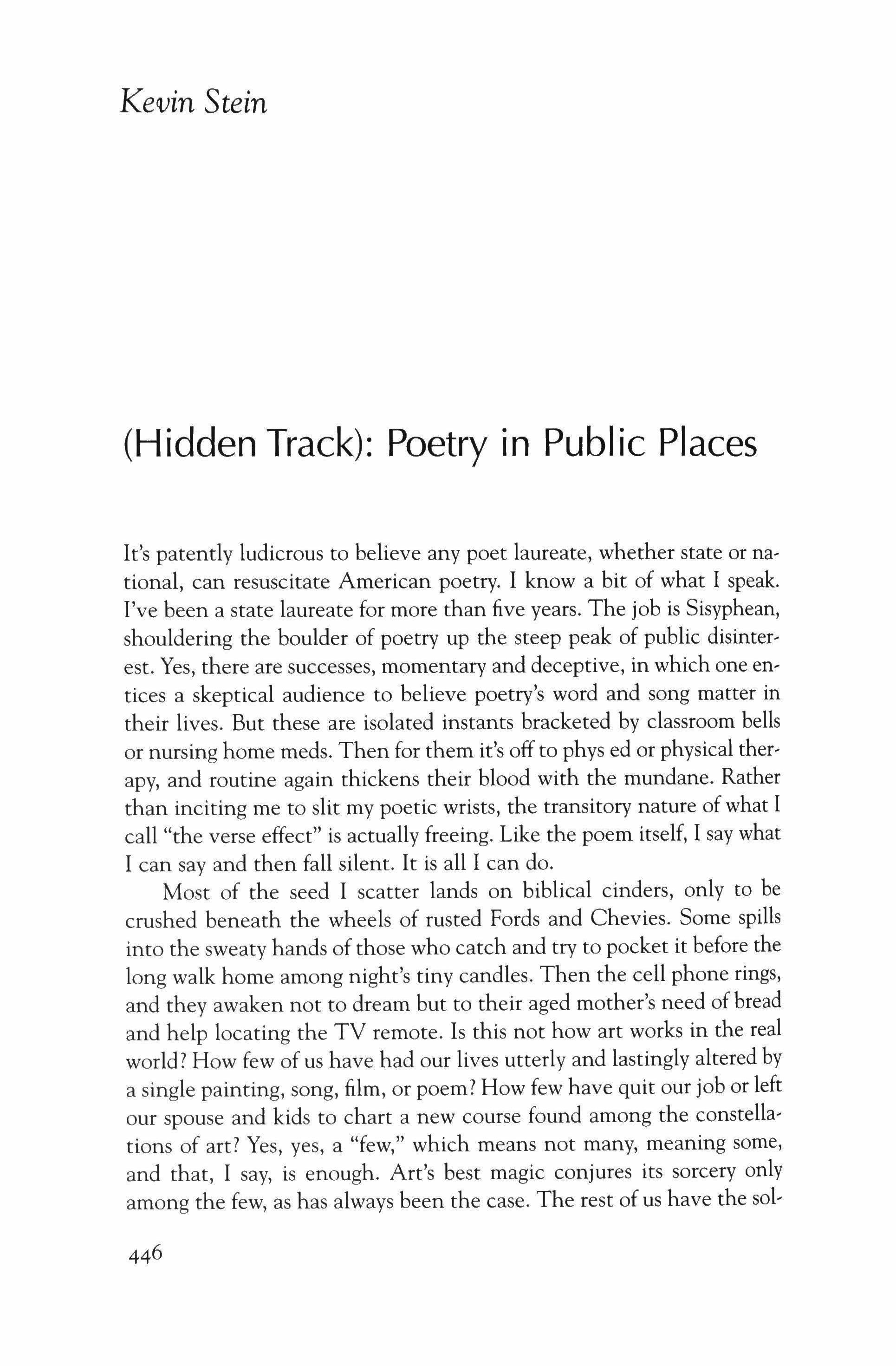
(Hidden Track): Poetry In Public Places
It's patently ludicrous to believe any poet laureate, whether state or national, can resuscitate American poetry. I know a bit of what I speak. I've been a state laureate for more than five years. The job is Sisyphean, shouldering the boulder of poetry up the steep peak of public disinterest. Yes, there are successes, momentary and deceptive, in which one entices a skeptical audience to believe poetry's word and song matter in their lives. But these are isolated instants bracketed by classroom bells or nursing home meds. Then for them it's off to phvs ed or physical therapy, and routine again thickens their blood with the mundane. Rather than inciting me to slit my poetic wrists, the transitory nature of what I call "the verse effect" is actually freeing. Like the poem itself, I say what I can say and then fall silent. It is all I can do.
Most of the seed I scatter lands on biblical cinders, only to be crushed beneath the wheels of rusted Fords and Chevies. Some spills into the sweaty hands of those who catch and try to pocket it before the long walk home among night's tiny candles. Then the cell phone rings, and they awaken not to dream but to their aged mother's need of bread and help locating the TV remote. Is this not how art works in the real world? How few of us have had our lives utterly and lastingly altered by a single painting, song, film, or poem? How few have quit our job or left our spouse and kids to chart a new course found among the constellations of art? Yes, yes, a "few," which means not many, meaning some, and that, I say, is enough. Art's best magic conjures its sorcery only among the few, as has always been the case. The rest of us have the sol-
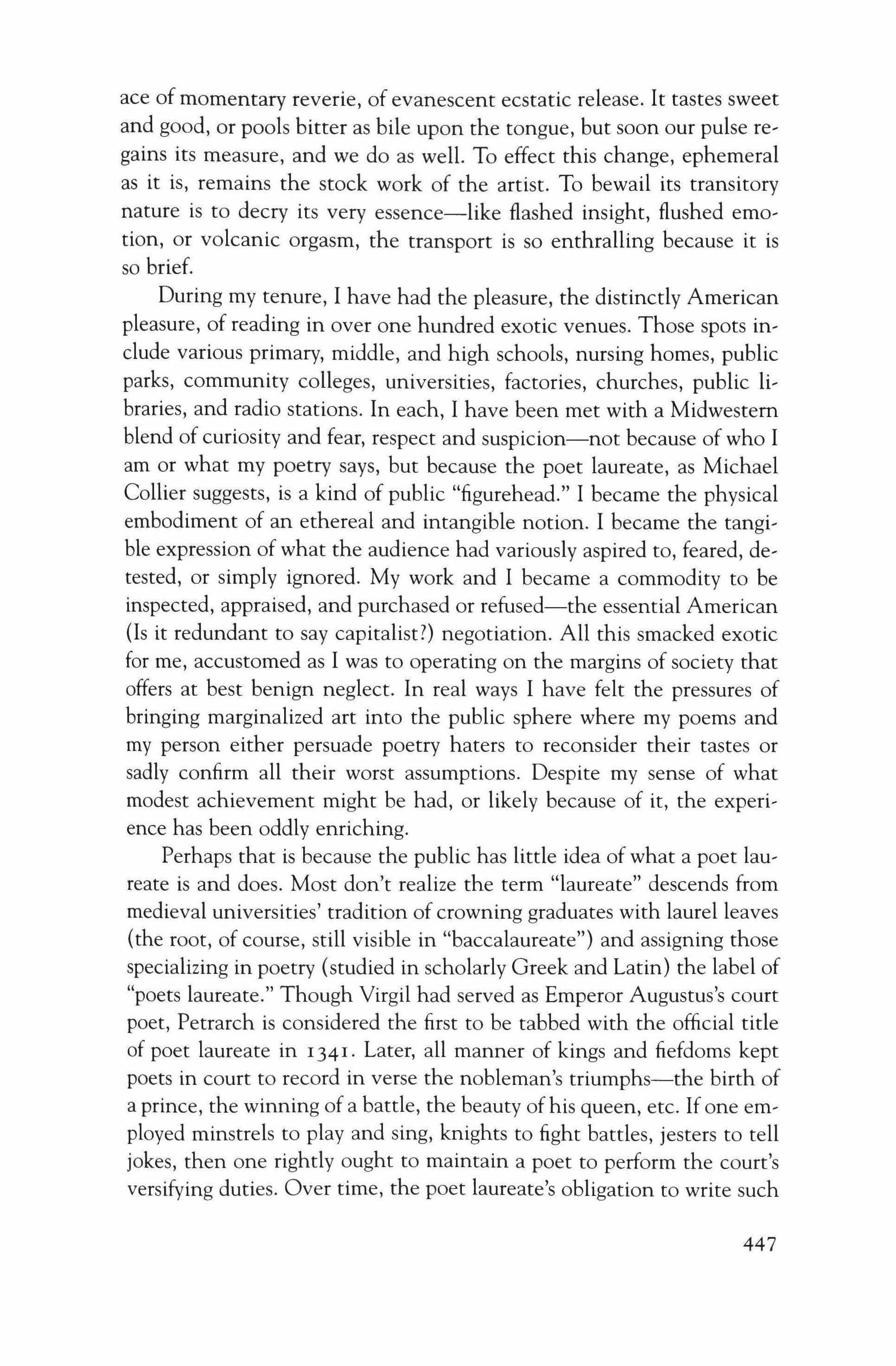
ace of momentary reverie, of evanescent ecstatic release. It tastes sweet and good, or pools bitter as bile upon the tongue, but soon our pulse regains its measure, and we do as well. To effect this change, ephemeral as it is, remains the stock work of the artist. To bewail its transitory nature is to decry its very essence-like flashed insight, flushed emotion, or volcanic orgasm, the transport is so enthralling because it is so brief.
During my tenure, I have had the pleasure, the distinctly American pleasure, of reading in over one hundred exotic venues. Those spots include various primary, middle, and high schools, nursing homes, public parks, community colleges, universities, factories, churches, public libraries, and radio stations. In each, I have been met with a Midwestern blend of curiosity and fear, respect and suspicion-not because of who I am or what my poetry says, but because the poet laureate, as Michael Collier suggests, is a kind of public "figurehead." I became the physical embodiment of an ethereal and intangible notion. I became the tangible expression of what the audience had variously aspired to, feared, detested, or simply ignored. My work and I became a commodity to be inspected, appraised, and purchased or refused-the essential American (Is it redundant to say capitalist?) negotiation. All this smacked exotic for me, accustomed as I was to operating on the margins of society that offers at best benign neglect. In real ways I have felt the pressures of bringing marginalized art into the public sphere where my poems and my person either persuade poetry haters to reconsider their tastes or sadly confirm all their worst assumptions. Despite my sense of what modest achievement might be had, or likely because of it, the experience has been oddly enriching.
Perhaps that is because the public has little idea of what a poet laureate is and does. Most don't realize the term "laureate" descends from medieval universities' tradition of crowning graduates with laurel leaves {the root, of course, still visible in "baccalaureate"} and assigning those specializing in poetry {studied in scholarly Greek and Latin} the label of "poets laureate." Though Virgil had served as Emperor Augustus's court poet, Petrarch is considered the first to be tabbed with the official title of poet laureate in 1341. Later, all manner of kings and fiefdoms kept poets in court to record in verse the nobleman's triumphs-the birth of a prince, the winning of a battle, the beauty ofhis queen, etc. If one employed minstrels to play and sing, knights to fight battles, jesters to tell jokes, then one rightly ought to maintain a poet to perform the court's versifying duties. Over time, the poet laureate's obligation to write such
447
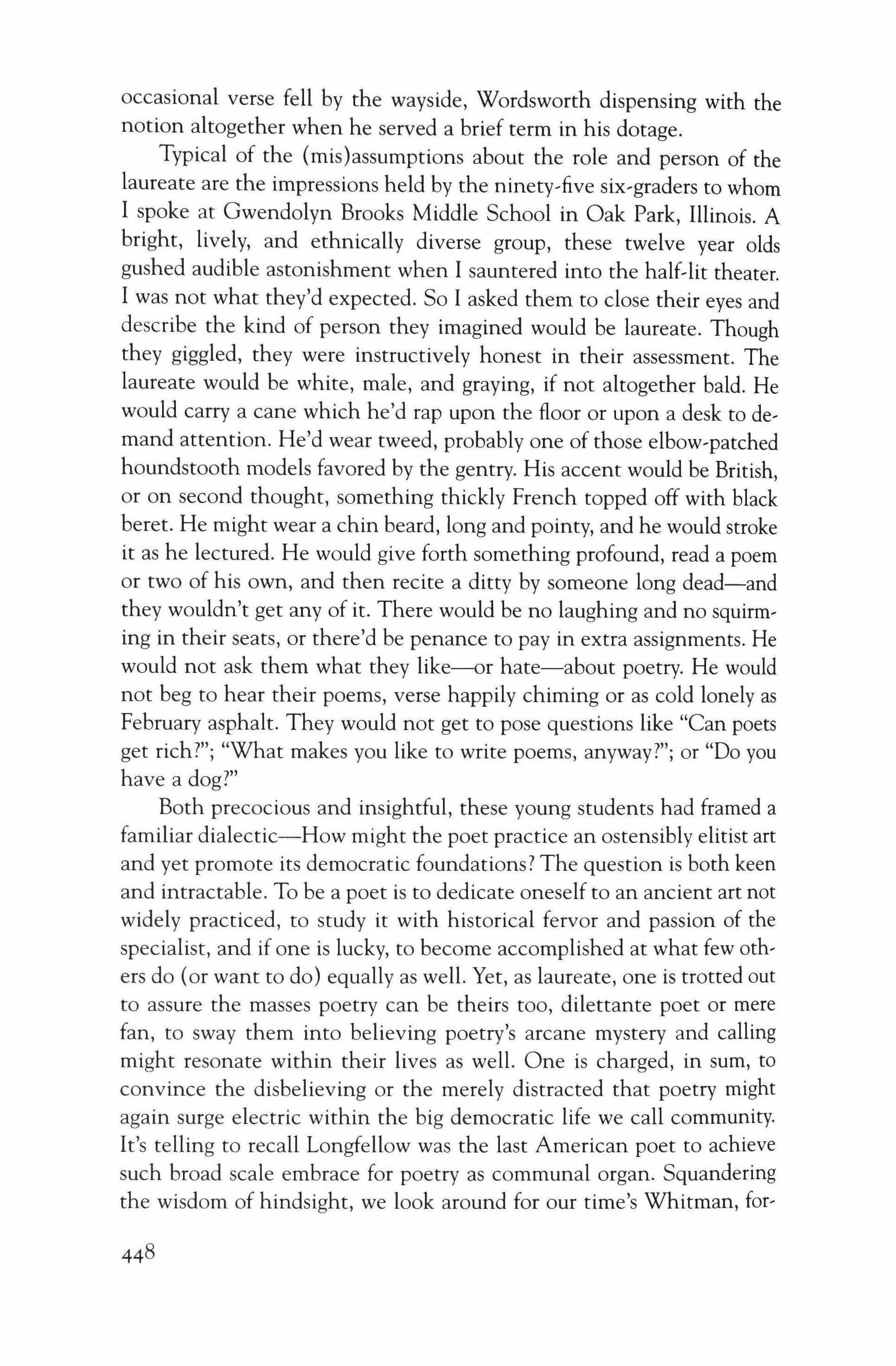
occasional verse fell by the wayside, Wordsworth dispensing with the notion altogether when he served a brief term in his dotage.
Typical of the (mis)assumptions about the role and person of the laureate are the impressions held by the ninety-five six-graders to whom I spoke at Gwendolyn Brooks Middle School in Oak Park, Illinois. A bright, lively, and ethnically diverse group, these twelve year olds gushed audible astonishment when I sauntered into the half-lit theater. I was not what they'd expected. So I asked them to close their eyes and describe the kind of person they imagined would be laureate. Though they giggled, they were instructively honest in their assessment. The laureate would be white, male, and graying, if not altogether bald. He would carry a cane which he'd rap upon the floor or upon a desk to demand attention. He'd wear tweed, probably one of those elbow-patched houndstooth models favored by the gentry. His accent would be British, or on second thought, something thickly French topped off with black beret. He might wear a chin beard, long and pointy, and he would stroke it as he lectured. He would give forth something profound, read a poem or two of his own, and then recite a ditty by someone long dead-and they wouldn't get any of it. There would be no laughing and no squirming in their seats, or there'd be penance to pay in extra assignments. He would not ask them what they like-or hate-about poetry. He would not beg to hear their poems, verse happily chiming or as cold lonely as February asphalt. They would not get to pose questions like "Can poets get rich?"; "What makes you like to write poems, anyway?"; or "Do you have a dog?"
Both precocious and insightful, these young students had framed a familiar dialectic-How might the poet practice an ostensibly elitist art and yet promote its democratic foundations? The question is both keen and intractable. To be a poet is to dedicate oneself to an ancient art not widely practiced, to study it with historical fervor and passion of the specialist, and if one is lucky, to become accomplished at what few others do (or want to do) equally as well. Yet, as laureate, one is trotted out to assure the masses poetry can be theirs too, dilettante poet or mere fan, to sway them into believing poetry's arcane mystery and calling might resonate within their lives as well. One is charged, in sum, to convince the disbelieving or the merely distracted that poetry might again surge electric within the big democratic life we call community. It's telling to recall Longfellow was the last American poet to achieve such broad scale embrace for poetry as communal organ. Squandering the wisdom of hindsight, we look around for our time's Whitman, for-
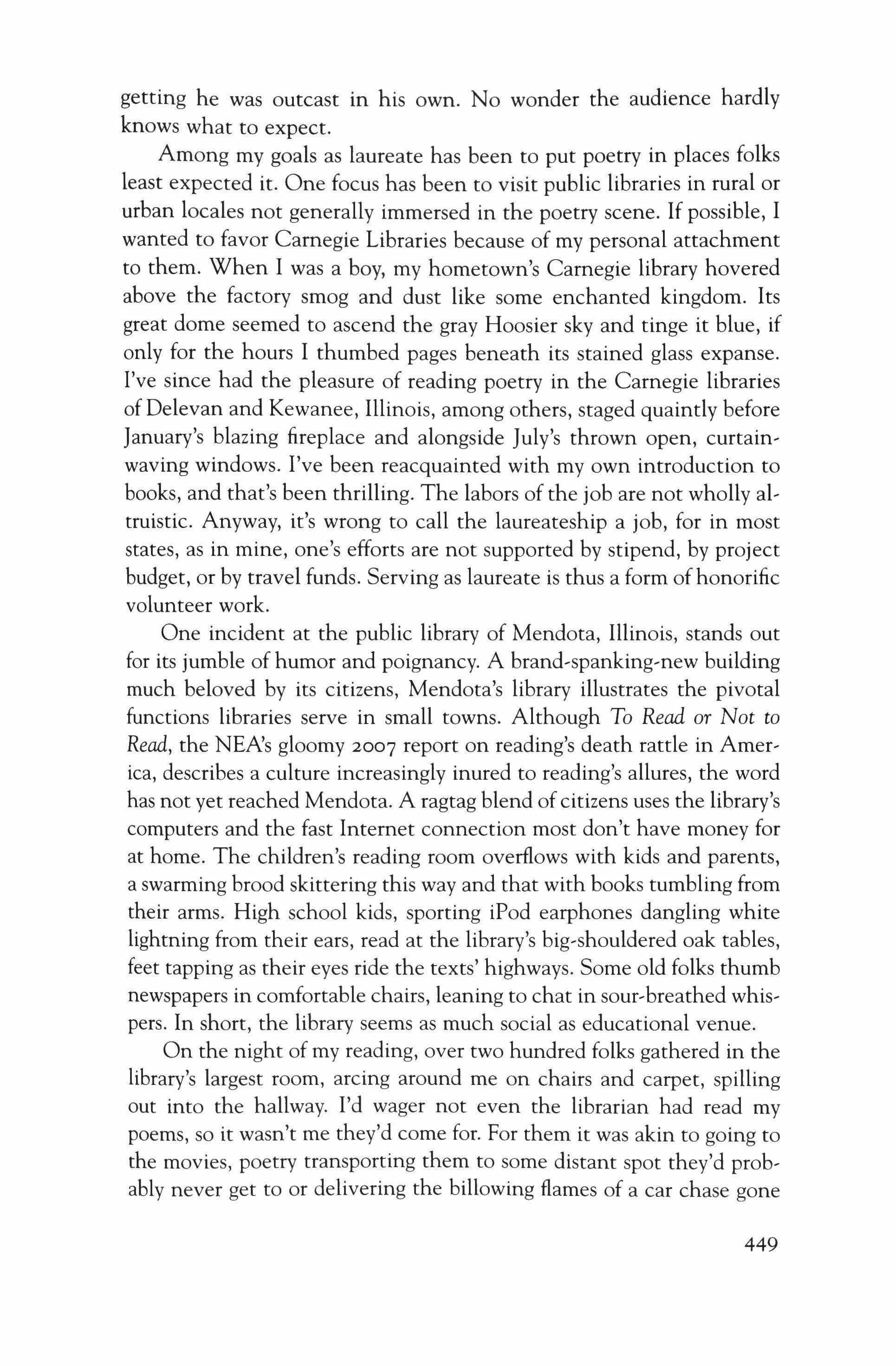
getting he was outcast in his own. No wonder the audience hardly knows what to expect.
Among my goals as laureate has been to put poetry in places folks least expected it. One focus has been to visit public libraries in rural or urban locales not generally immersed in the poetry scene. If possible, I wanted to favor Carnegie Libraries because of my personal attachment to them. When I was a boy, my hometown's Carnegie library hovered above the factory smog and dust like some enchanted kingdom. Its great dome seemed to ascend the gray Hoosier sky and tinge it blue, if only for the hours I thumbed pages beneath its stained glass expanse. I've since had the pleasure of reading poetry in the Carnegie libraries of Delevan and Kewanee, Illinois, among others, staged quaintly before January's blazing fireplace and alongside July's thrown open, curtainwaving windows. I've been reacquainted with my own introduction to books, and that's been thrilling. The labors of the job are not wholly altruistic. Anyway, it's wrong to call the laureateship a job, for in most states, as in mine, one's efforts are not supported by stipend, by project budget, or by travel funds. Serving as laureate is thus a form ofhonorific volunteer work.
One incident at the public library of Mendota, Illinois, stands out for its jumble of humor and poignancy. A brand-spanking-new building much beloved by its citizens, Mendota's library illustrates the pivotal functions libraries serve in small towns. Although To Read or Not to Read, the NEA's gloomy 2007 report on reading's death rattle in America, describes a culture increasingly inured to reading's allures, the word has not yet reached Mendota. A ragtag blend of citizens uses the library's computers and the fast Internet connection most don't have money for at home. The children's reading room overflows with kids and parents, a swarming brood skittering this way and that with books tumbling from their arms. High school kids, sporting iPod earphones dangling white lightning from their ears, read at the library's big-shouldered oak tables, feet tapping as their eyes ride the texts' highways. Some old folks thumb newspapers in comfortable chairs, leaning to chat in sour-breathed whispers. In short, the library seems as much social as educational venue.
On the night of my reading, over two hundred folks gathered in the library's largest room, arcing around me on chairs and carpet, spilling out into the hallway. I'd wager not even the librarian had read my poems, so it wasn't me they'd come for. For them it was akin to going to the movies, poetry transporting them to some distant spot they'd probably never get to or delivering the billowing flames of a car chase gone
449
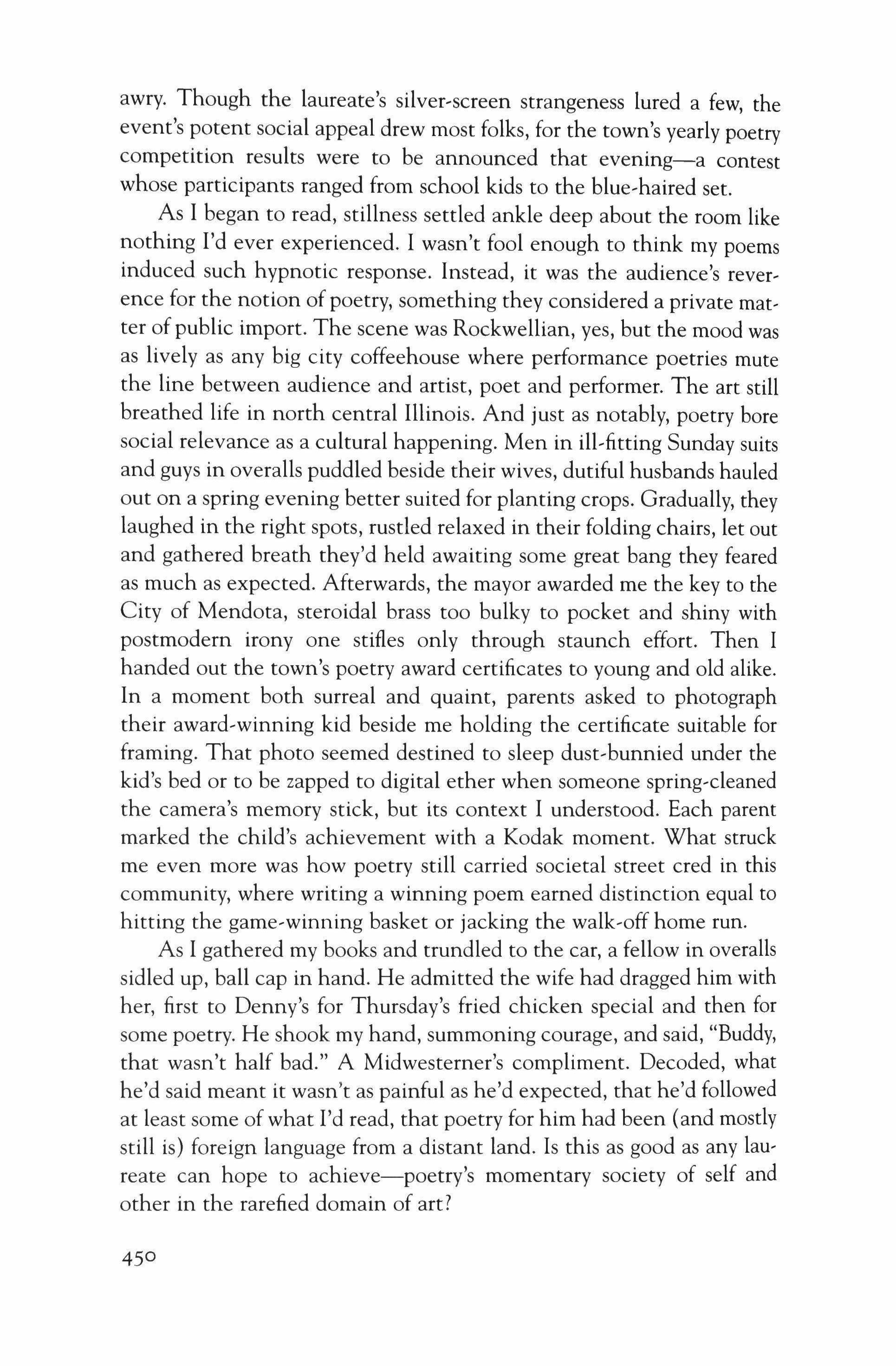
awry. Though the laureate's silver-screen strangeness lured a few, the event's potent social appeal drew most folks, for the town's yearly poetry competition results were to be announced that evening-a contest whose participants ranged from school kids to the blue-haired set.
As I began to read, stillness settled ankle deep about the room like nothing I'd ever experienced. I wasn't fool enough to think my poems induced such hypnotic response. Instead, it was the audience's reverence for the notion of poetry, something they considered a private matter of public import. The scene was Rockwellian, yes, but the mood was as lively as any big city coffeehouse where performance poetries mute the line between audience and artist, poet and performer. The art still breathed life in north central Illinois. And just as notably, poetry bore social relevance as a cultural happening. Men in ill-fitting Sunday suits and guys in overalls puddled beside their wives, dutiful husbands hauled out on a spring evening better suited for planting crops. Gradually, they laughed in the right spots, rustled relaxed in their folding chairs, let out and gathered breath they'd held awaiting some great bang they feared as much as expected. Afterwards, the mayor awarded me the key to the City of Mendota, steroidal brass too bulky to pocket and shiny with postmodern irony one stifles only through staunch effort. Then I handed out the town's poetry award certificates to young and old alike. In a moment both surreal and quaint, parents asked to photograph their award-winning kid beside me holding the certificate suitable for framing. That photo seemed destined to sleep dust-bunnied under the kid's bed or to be zapped to digital ether when someone spring-cleaned the camera's memory stick, but its context I understood. Each parent marked the child's achievement with a Kodak moment. What struck me even more was how poetry still carried societal street cred in this community, where writing a winning poem earned distinction equal to hitting the game-winning basket or jacking the walk-off home run.
As I gathered my books and trundled to the car, a fellow in overalls sidled up, ball cap in hand. He admitted the wife had dragged him with her, first to Denny's for Thursday's fried chicken special and then for some poetry. He shook my hand, summoning courage, and said, "Buddy, that wasn't half bad." A Midwesterner's compliment. Decoded, what he'd said meant it wasn't as painful as he'd expected, that he'd followed at least some of what I'd read, that poetry for him had been (and mostly still is) foreign language from a distant land. Is this as good as any laureate can hope to achieve-poetry's momentary society of self and other in the rarefied domain of art?
450
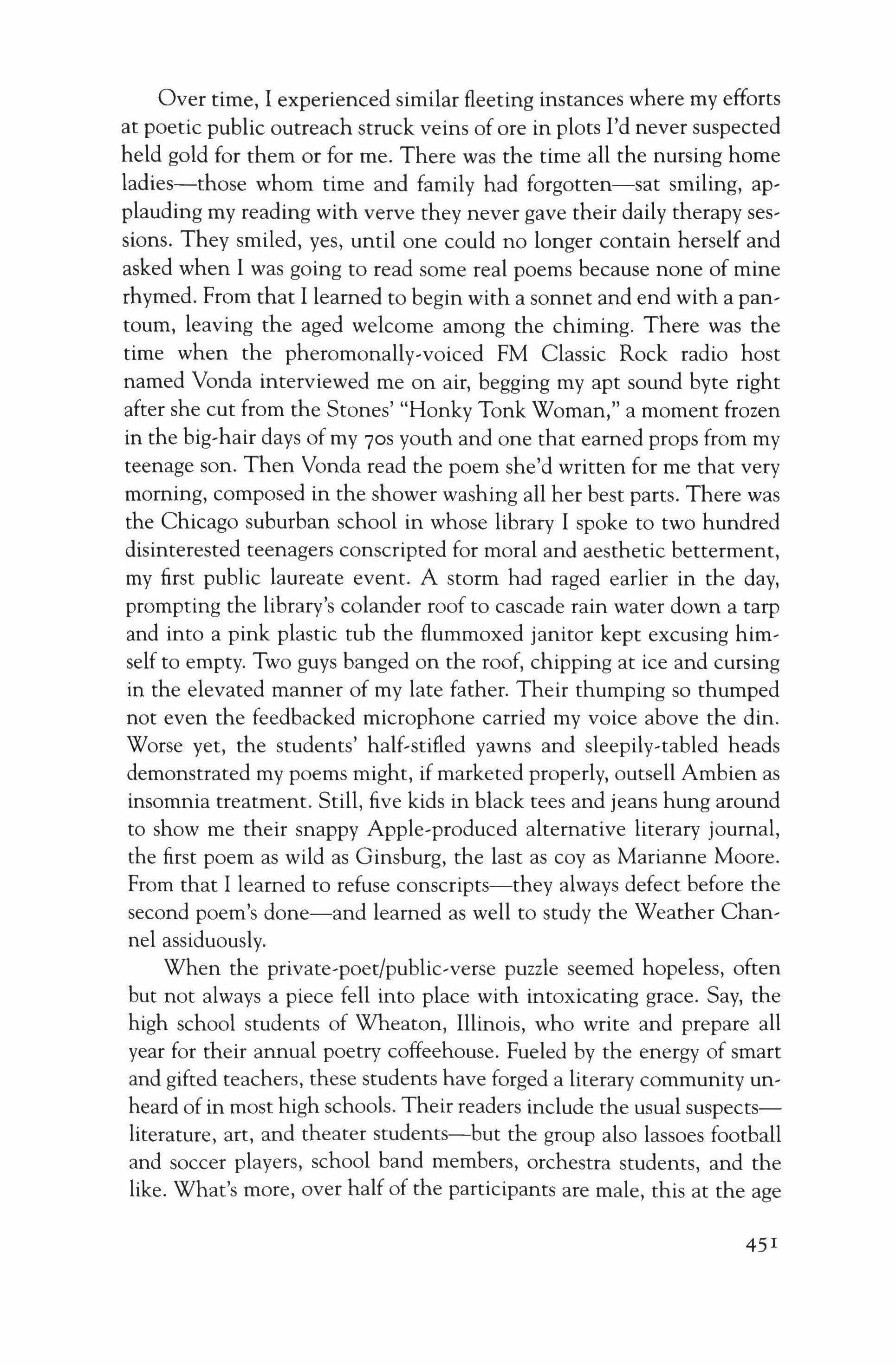
Over time, I experienced similar fleeting instances where my efforts at poetic public outreach struck veins of ore in plots I'd never suspected held gold for them or for me. There was the time all the nursing home ladies-those whom time and family had forgotten-sat smiling, applauding my reading with verve they never gave their daily therapy sessions. They smiled, yes, until one could no longer contain herself and asked when I was going to read some real poems because none of mine rhymed. From that I learned to begin with a sonnet and end with a pantoum, leaving the aged welcome among the chiming. There was the time when the pheromonally-voiced FM Classic Rock radio host named Venda interviewed me on air, begging my apt sound byte right after she cut from the Stones' "Honky Tonk Woman," a moment frozen in the big-hair days of my 70S youth and one that earned props from my teenage son. Then Vonda read the poem she'd written for me that very morning, composed in the shower washing all her best parts. There was the Chicago suburban school in whose library I spoke to two hundred disinterested teenagers conscripted for moral and aesthetic betterment, my first public laureate event. A storm had raged earlier in the day, prompting the library's colander roof to cascade rain water down a tarp and into a pink plastic tub the flummoxed janitor kept excusing himself to empty. Two guys banged on the roof, chipping at ice and cursing in the elevated manner of my late father. Their thumping so thumped not even the feedbacked microphone carried my voice above the din. Worse yet, the students' half-stifled yawns and sleepily-tabled heads demonstrated my poems might, if marketed properly, outsell Ambien as insomnia treatment. Still, five kids in black tees and jeans hung around to show me their snappy Apple-produced alternative literary journal, the first poem as wild as Ginsburg, the last as coy as Marianne Moore. From that I learned to refuse conscripts-they always defect before the second poem's done-and learned as well to study the Weather Channel assiduously.
When the private-poet/public-verse puzzle seemed hopeless, often but not always a piece fell into place with intoxicating grace. Say, the high school students of Wheaton, Illinois, who write and prepare all year for their annual poetry coffeehouse. Fueled by the energy of smart and gifted teachers, these students have forged a literary community unheard of in most high schools. Their readers include the usual suspectsliterature, art, and theater students-but the group also lassoes football and soccer players, school band members, orchestra students, and the like. What's more, over half of the participants are male, this at the age
451
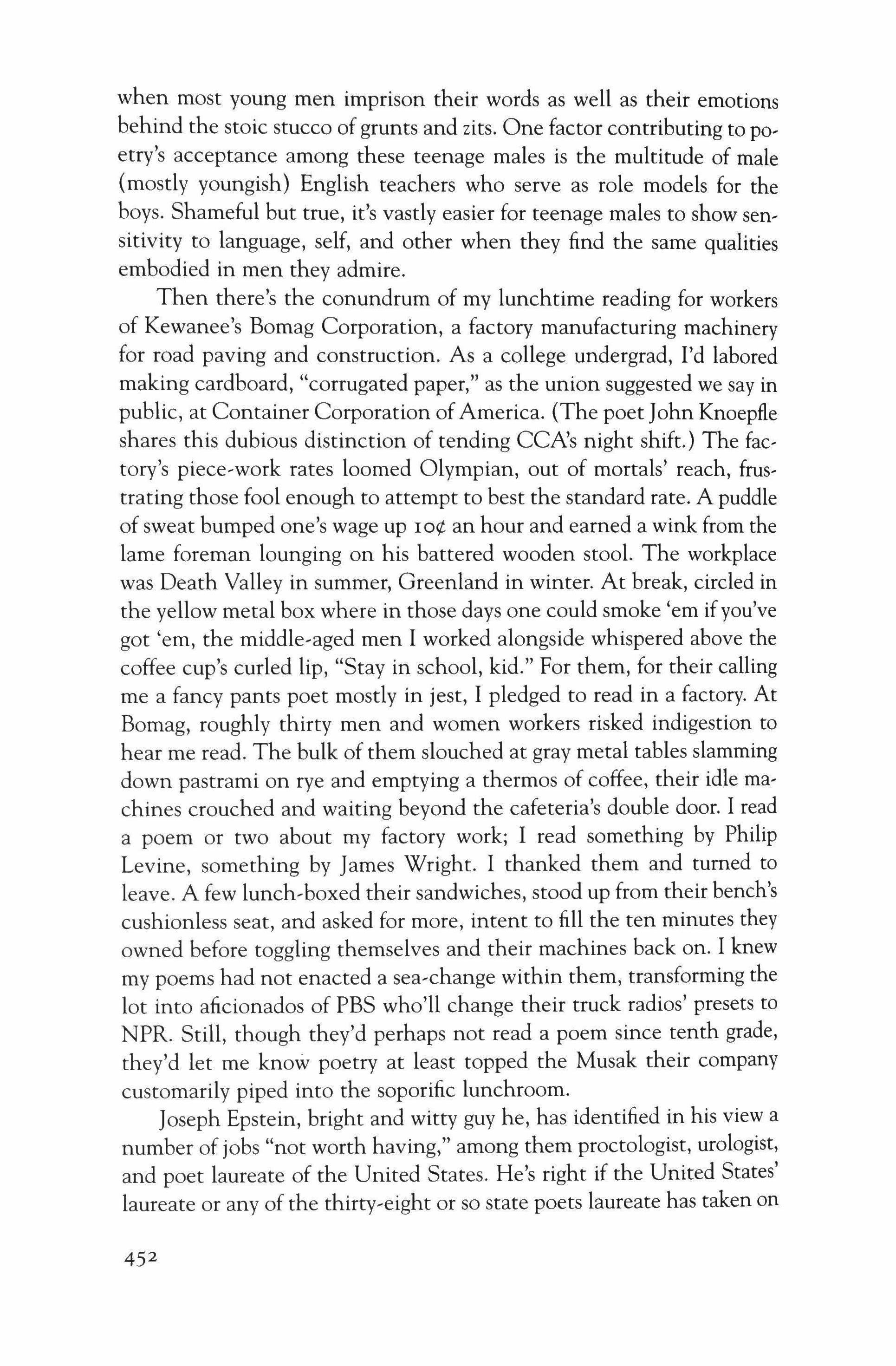
when most young men imprison their words as well as their emotions behind the stoic stucco of grunts and zits. One factor contributing to poetry's acceptance among these teenage males is the multitude of male (mostly youngish) English teachers who serve as role models for the boys. Shameful but true, it's vastly easier for teenage males to show sen, sitivity to language, self, and other when they find the same qualities embodied in men they admire.
Then there's the conundrum of my lunchtime reading for workers of Kewanee's Bomag Corporation, a factory manufacturing machinery for road paving and construction. As a college undergrad, I'd labored making cardboard, "corrugated paper," as the union suggested we say in public, at Container Corporation ofAmerica. (The poet John Knoepfle shares this dubious distinction of tending CCA's night shift.) The factory's piece-work rates loomed Olympian, out of mortals' reach, frustrating those fool enough to attempt to best the standard rate. A puddle of sweat bumped one's wage up IO¢ an hour and earned a wink from the lame foreman lounging on his battered wooden stool. The workplace was Death Valley in summer, Greenland in winter. At break, circled in the yellow metal box where in those days one could smoke 'em ifyou've got 'em, the middle,aged men I worked alongside whispered above the coffee cup's curled lip, "Stay in school, kid." For them, for their calling me a fancy pants poet mostly in jest, I pledged to read in a factory. At Bomag, roughly thirty men and women workers risked indigestion to hear me read. The bulk of them slouched at gray metal tables slamming down pastrami on rye and emptying a thermos of coffee, their idle rna, chines crouched and waiting beyond the cafeteria's double door. I read a poem or two about my factory work; I read something by Philip Levine, something by James Wright. I thanked them and turned to leave. A few lunch,boxed their sandwiches, stood up from their bench's cushionless seat, and asked for more, intent to fill the ten minutes they owned before toggling themselves and their machines back on. I knew my poems had not enacted a sea'change within them, transforming the lot into aficionados of PBS who'll change their truck radios' presets to NPR. Still, though they'd perhaps not read a poem since tenth grade, they'd let me know poetry at least topped the Musak their company customarily piped into the soporific lunchroom.
Joseph Epstein, bright and witty guy he, has identified in his view a number of jobs "not worth having," among them proctologist, urologist, and poet laureate of the United States. He's right if the United States' laureate or any of the thirtv-eight or so state poets laureate has taken on
452
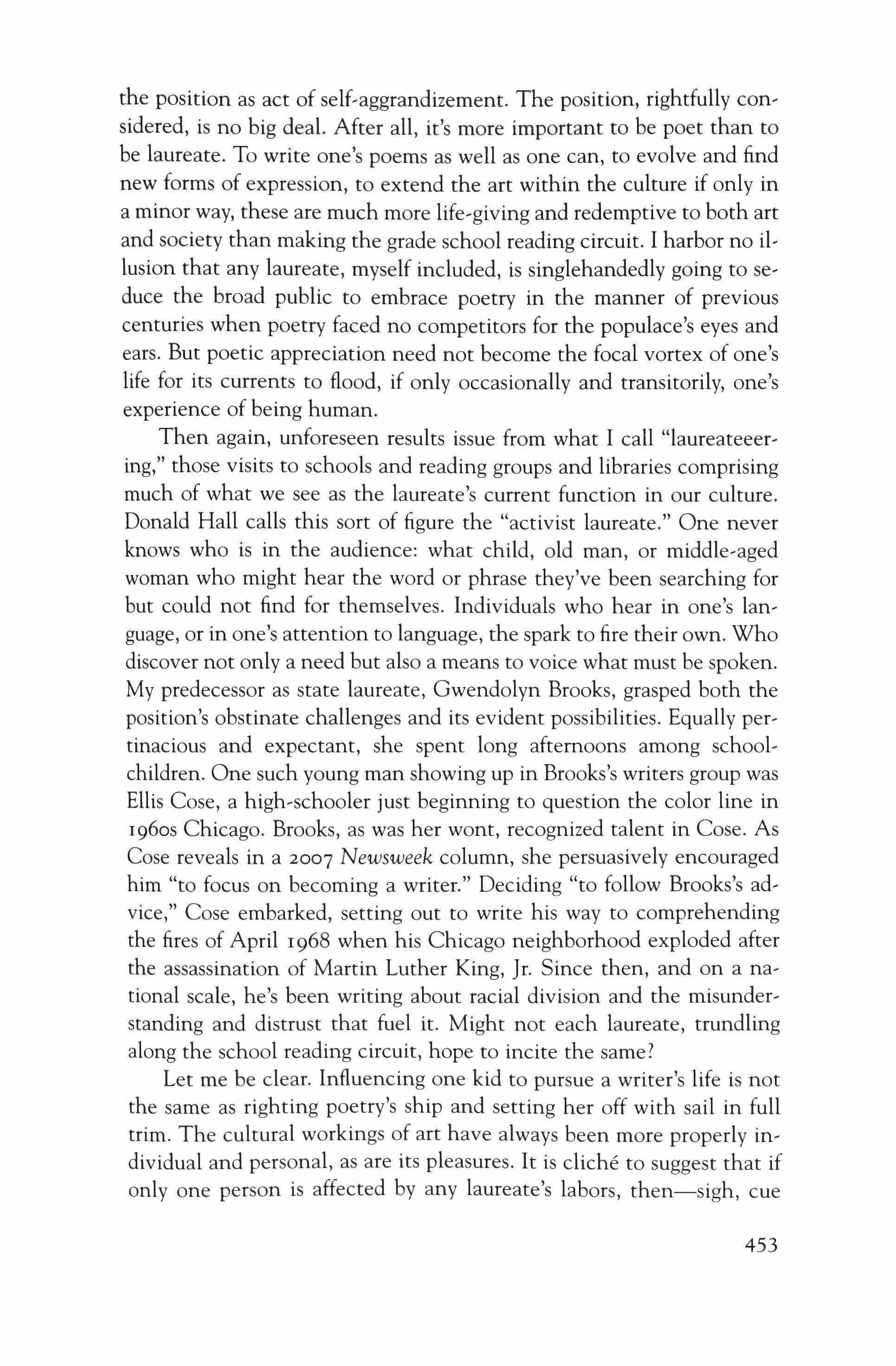
the position as act of self-aggrandizement. The position, rightfully considered, is no big deal. After all, it's more important to be poet than to be laureate. To write one's poems as well as one can, to evolve and find new forms of expression, to extend the art within the culture if only in a minor way, these are much more life-giving and redemptive to both art and society than making the grade school reading circuit. I harbor no illusion that any laureate, myself included, is singlehandedly going to seduce the broad public to embrace poetry in the manner of previous centuries when poetry faced no competitors for the populace's eyes and ears. But poetic appreciation need not become the focal vortex of one's life for its currents to flood, if only occasionally and transitorily, one's experience of being human.
Then again, unforeseen results issue from what I call "laureateeering," those visits to schools and reading groups and libraries comprising much of what we see as the laureate's current function in our culture. Donald Hall calls this sort of figure the "activist laureate." One never knows who is in the audience: what child, old man, or middle-aged woman who might hear the word or phrase they've been searching for but could not find for themselves. Individuals who hear in one's language, or in one's attention to language, the spark to fire their own. Who discover not only a need but also a means to voice what must be spoken. My predecessor as state laureate, Gwendolyn Brooks, grasped both the position's obstinate challenges and its evident possibilities. Equally pertinacious and expectant, she spent long afternoons among schoolchildren. One such young man showing up in Brooks's writers group was Ellis Cose, a high-schooler just beginning to question the color line in 1960s Chicago. Brooks, as was her wont, recognized talent in Cose. As Cose reveals in a 2007 Newsweek column, she persuasively encouraged him "to focus on becoming a writer." Deciding "to follow Brooks's advice," Cose embarked, setting out to write his way to comprehending the fires of April 1968 when his Chicago neighborhood exploded after the assassination of Martin Luther King, Jr. Since then, and on a national scale, he's been writing about racial division and the misunderstanding and distrust that fuel it. Might not each laureate, trundling along the school reading circuit, hope to incite the same?
Let me be clear. Influencing one kid to pursue a writer's life is not the same as righting poetry's ship and setting her off with sail in full trim. The cultural workings of art have always been more properly individual and personal, as are its pleasures. It is cliche to suggest that if only one person is affected by any laureate's labors, then-sigh, cue
453
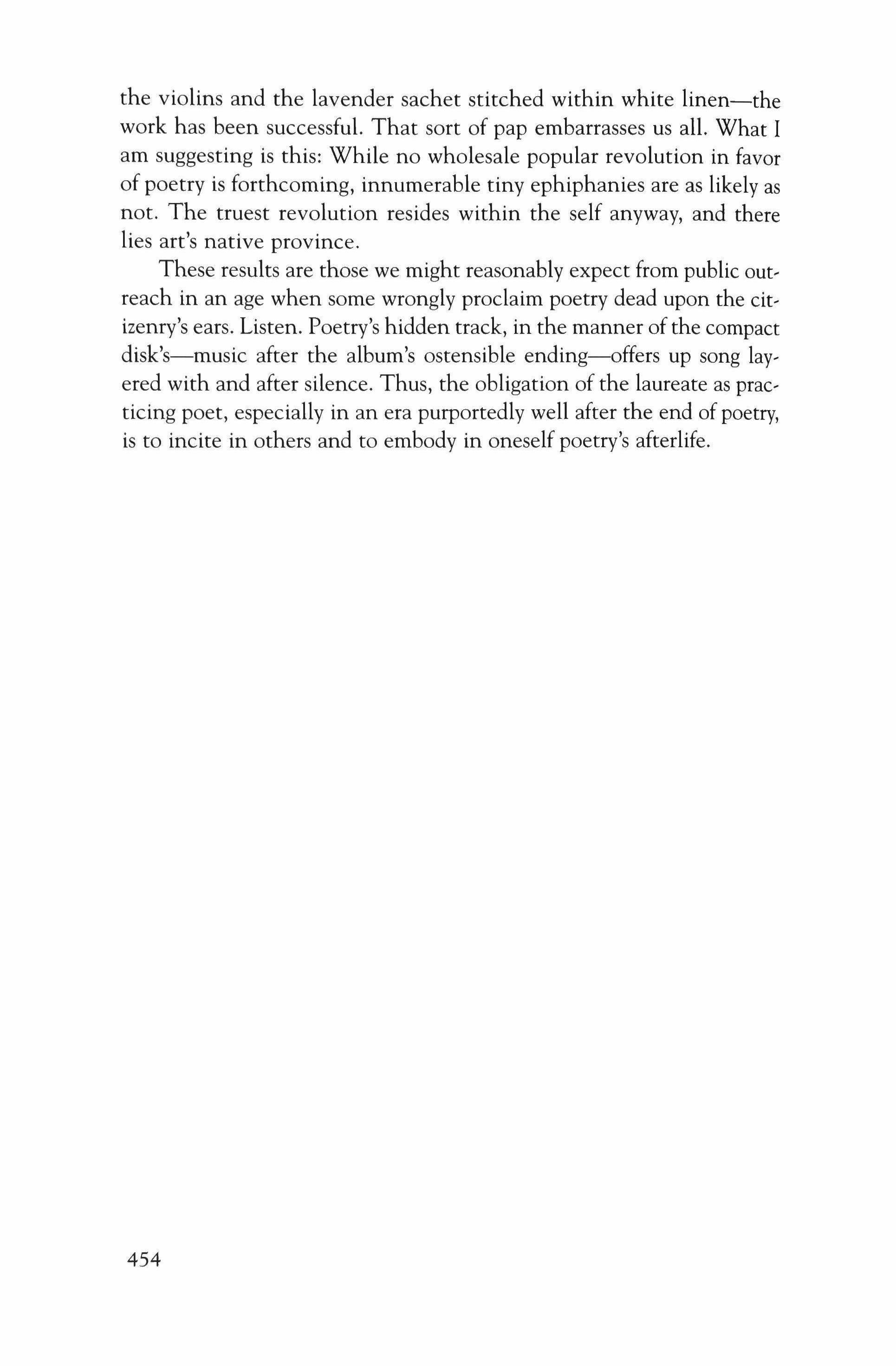
the violins and the lavender sachet stitched within white linen-the work has been successful. That sort of pap embarrasses us all. What I am suggesting is this: While no wholesale popular revolution in favor of poetry is forthcoming, innumerable tiny ephiphanies are as likely as not. The truest revolution resides within the self anyway, and there lies art's native province.
These results are those we might reasonably expect from public outreach in an age when some wrongly proclaim poetry dead upon the citizenry's ears. Listen. Poetry's hidden track, in the manner of the compact disk's-music after the album's ostensible ending-offers up song layered with and after silence. Thus, the obligation of the laureate as practicing poet, especially in an era purportedly well after the end of poetry, is to incite in others and to embody in oneself poetry's afterlife.
454
Paul Breslin
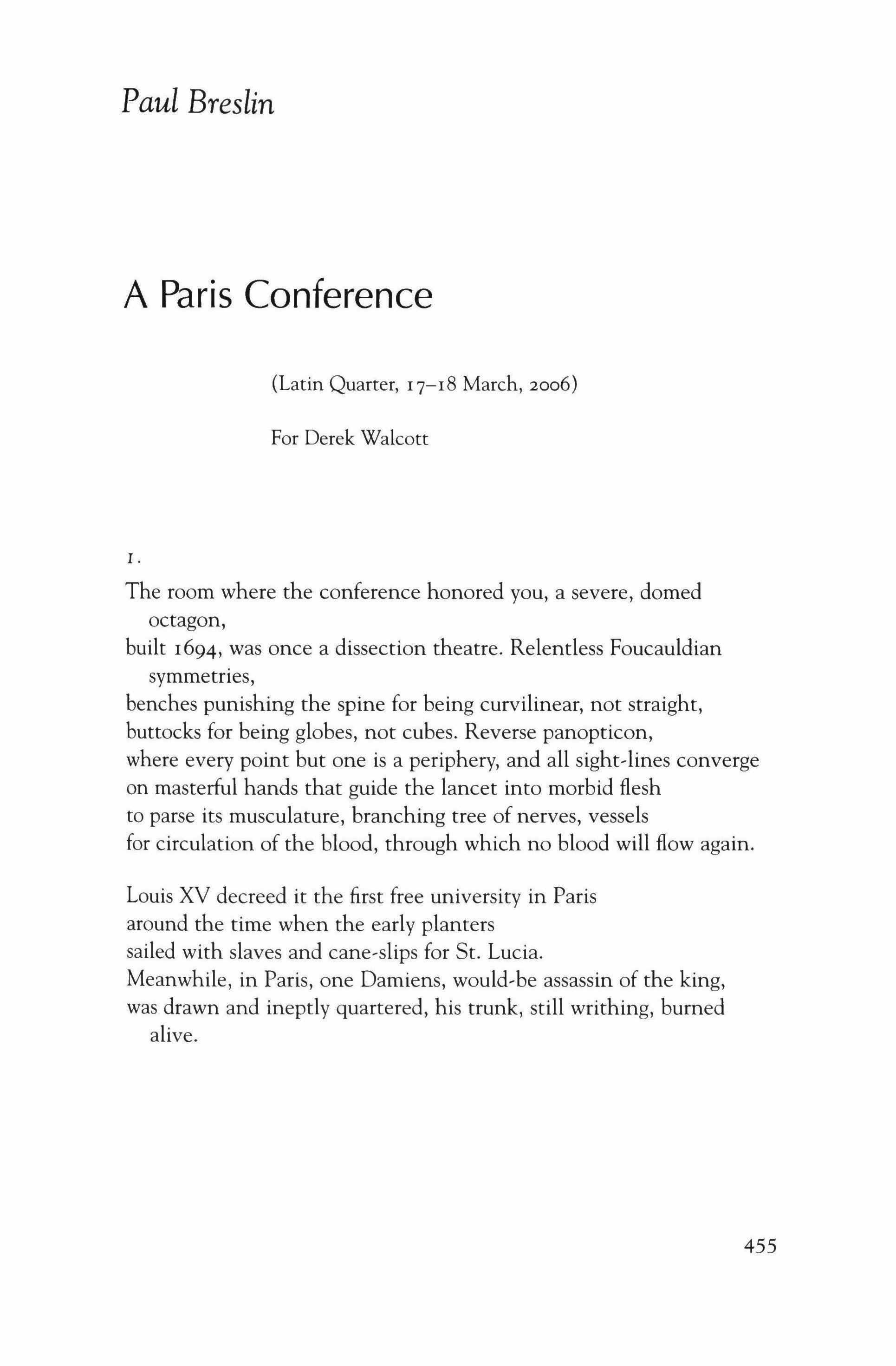
A Paris Conference
(Latin Quarter, 17- I 8 March, 2006)
For Derek Walcott
1.
The room where the conference honored you, a severe, domed octagon, built 1694, was once a dissection theatre. Relentless Foucauldian symmetries, benches punishing the spine for being curvilinear, not straight, buttocks for being globes, not cubes. Reverse panopticon, where every point but one is a periphery, and all sight-lines converge on masterful hands that guide the lancet into morbid flesh to parse its musculature, branching tree of nerves, vessels for circulation of the blood, through which no blood will flow again.
Louis XV decreed it the first free university in Paris around the time when the early planters sailed with slaves and cane-slips for St. Lucia. Meanwhile, in Paris, one Damiens, would-be assassin of the king, was drawn and ineptly quartered, his trunk, still writhing, burned alive.
455
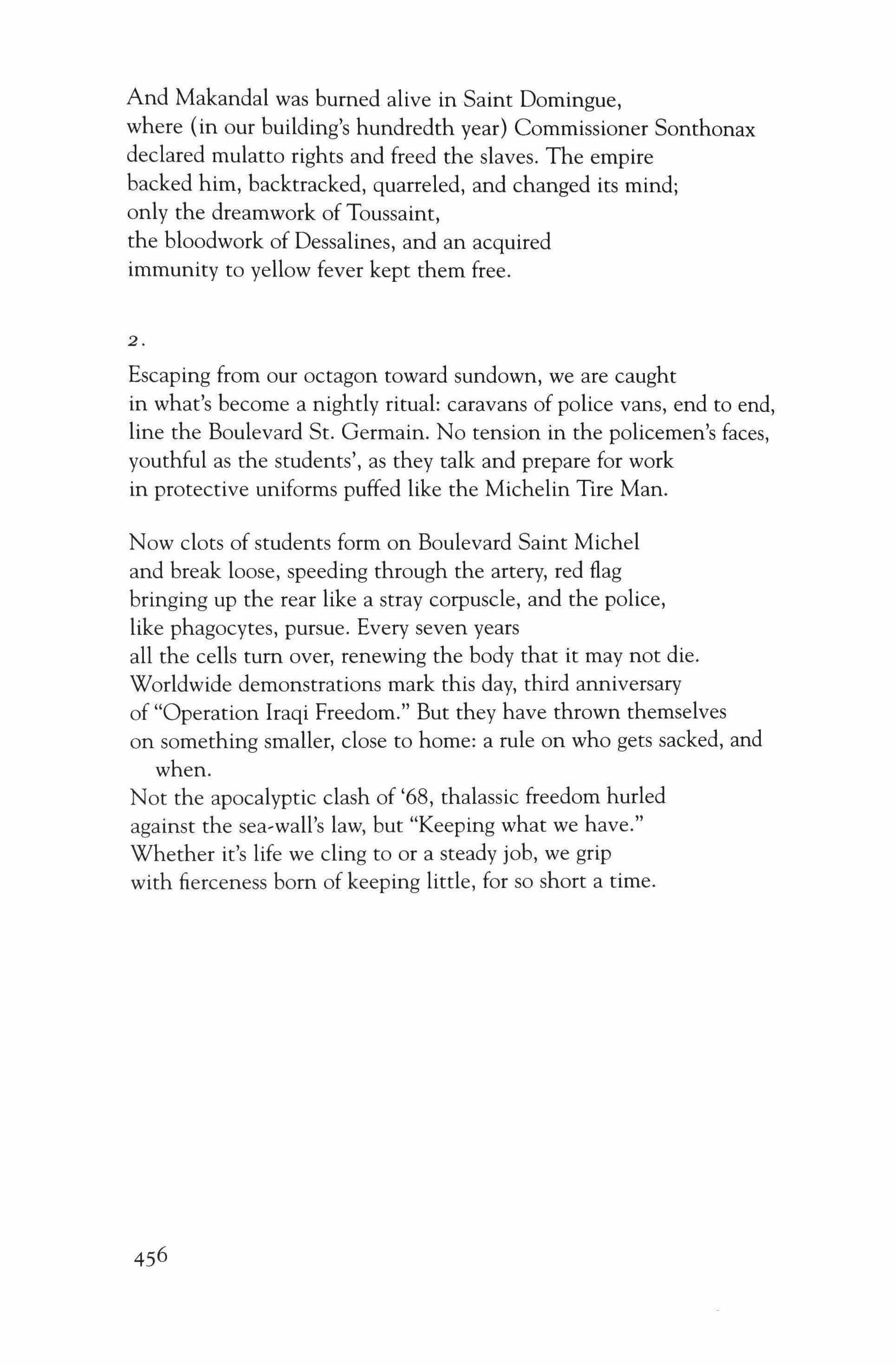
And Makandal was burned alive in Saint Domingue, where (in our building's hundredth year) Commissioner Sonthonax declared mulatto rights and freed the slaves. The empire backed him, backtracked, quarreled, and changed its mind; only the dreamwork of Toussaint, the bloodwork of Dessalines, and an acquired immunity to yellow fever kept them free.
2.
Escaping from our octagon toward sundown, we are caught in what's become a nightly ritual: caravans of police vans, end to end, line the Boulevard St. Germain. No tension in the policemen's faces, youthful as the students', as they talk and prepare for work in protective uniforms puffed like the Michelin Tire Man.
Now clots of students form on Boulevard Saint Michel and break loose, speeding through the artery, red flag bringing up the rear like a stray corpuscle, and the police, like phagocytes, pursue. Every seven years all the cells tum over, renewing the body that it may not die. Worldwide demonstrations mark this day, third anniversary of "Operation Iraqi Freedom." But they have thrown themselves on something smaller, close to home: a rule on who gets sacked, and when.
Not the apocalyptic clash of '68, thalassic freedom hurled against the sea-wall's law, but "Keeping what we have."
Whether it's life we cling to or a steady job, we grip with fierceness born of keeping little, for so short a time.
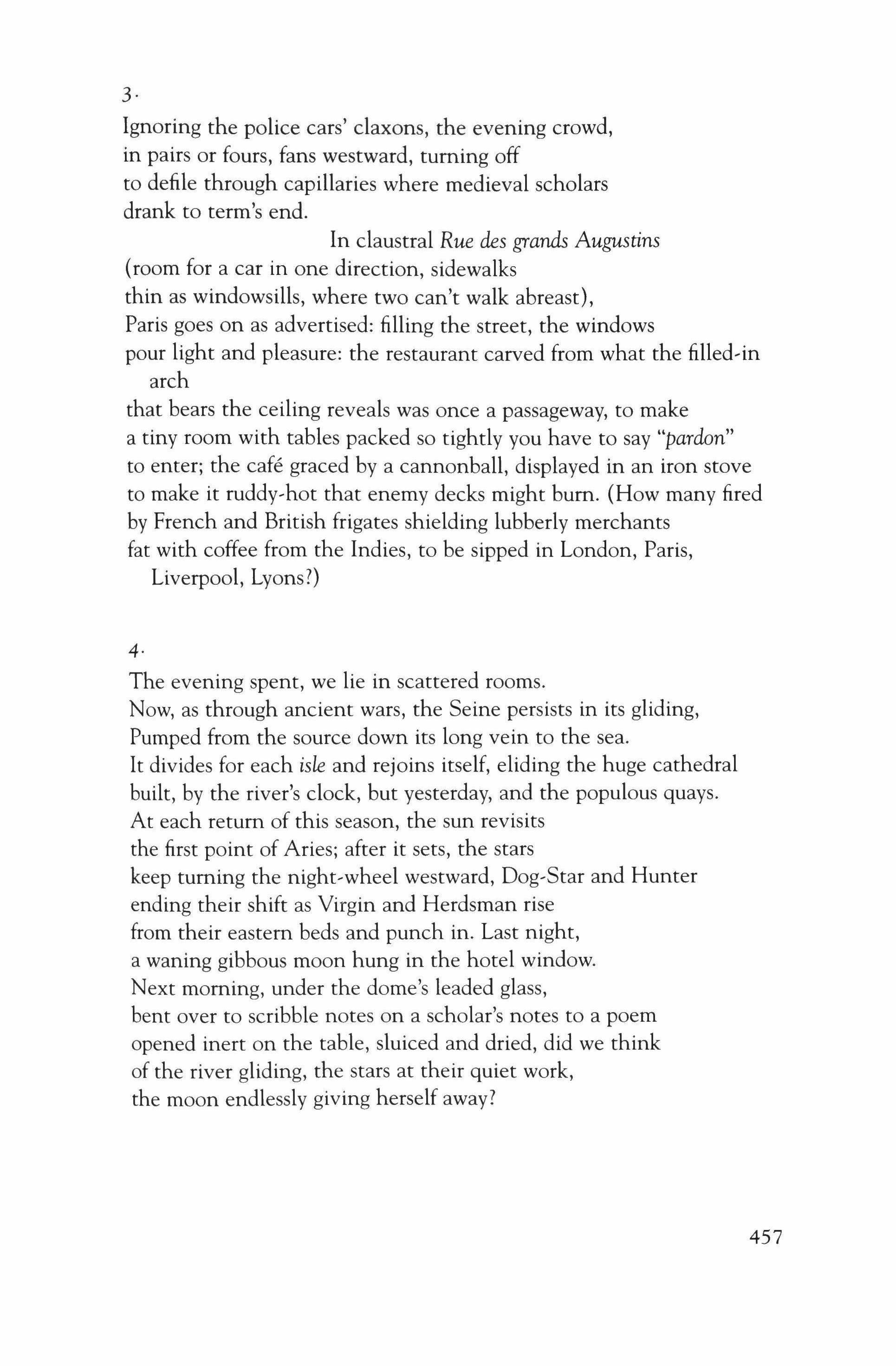
Ignoring the police cars' claxons, the evening crowd, in pairs or fours, fans westward, turning off to defile through capillaries where medieval scholars drank to term's end.
In claustral Rue des grands Augustins {room for a car in one direction, sidewalks thin as windowsills, where two can't walk abreast}, Paris goes on as advertised: filling the street, the windows pour light and pleasure: the restaurant carved from what the filled-in arch that bears the ceiling reveals was once a passageway, to make a tiny room with tables packed so tightly you have to say "pardon" to enter; the cafe graced by a cannonball, displayed in an iron stove to make it ruddy-hot that enemy decks might bum. {How many fired by French and British frigates shielding lubberly merchants fat with coffee from the Indies, to be sipped in London, Paris, Liverpool, Lyons?}
4·
The evening spent, we lie in scattered rooms.
Now, as through ancient wars, the Seine persists in its gliding, Pumped from the source down its long vein to the sea. It divides for each isle and rejoins itself, eliding the huge cathedral built, by the river's clock, but yesterday, and the populous quays. At each return of this season, the sun revisits the first point of Aries; after it sets, the stars keep turning the night-wheel westward, Dog-Star and Hunter ending their shift as Virgin and Herdsman rise from their eastern beds and punch in. Last night, a waning gibbous moon hung in the hotel window. Next morning, under the dome's leaded glass, bent over to scribble notes on a scholar's notes to a poem opened inert on the table, sluiced and dried, did we think of the river gliding, the stars at their quiet work, the moon endlessly giving herself away?
3·
457
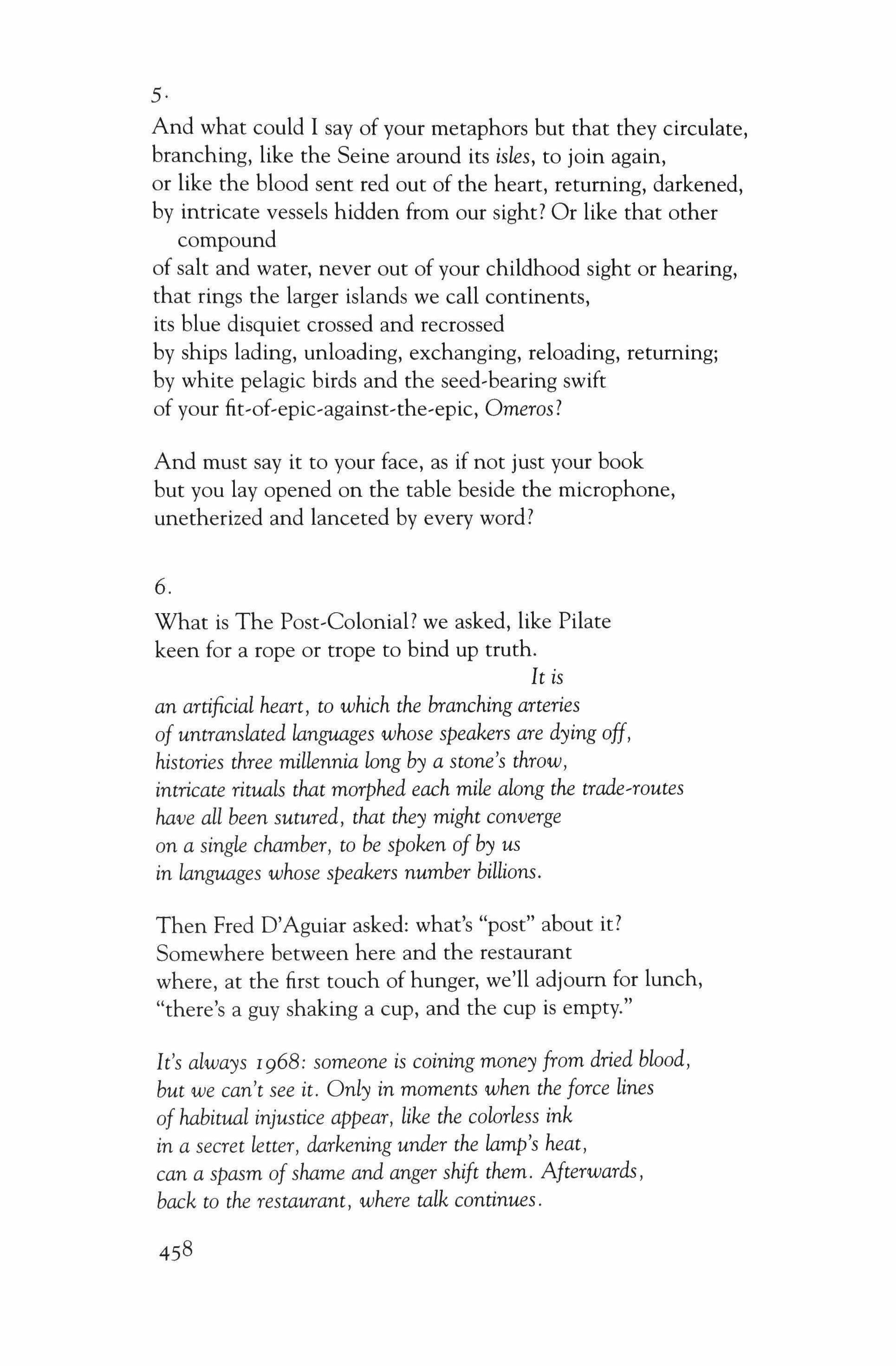
5·
And what could I say of your metaphors but that they circulate, branching, like the Seine around its isles, to join again, or like the blood sent red out of the heart, returning, darkened, by intricate vessels hidden from our sight? Or like that other compound of salt and water, never out of your childhood sight or hearing, that rings the larger islands we call continents, its blue disquiet crossed and recrossed by ships lading, unloading, exchanging, reloading, returning; by white pelagic birds and the seed-bearing swift of your fit-of-epic-against-the-epic, Omeros?
And must say it to your face, as if not just your book but you lay opened on the table beside the microphone, unetherized and lanceted by every word?
6.
What is The Post-Colonial? we asked, like Pilate keen for a rope or trope to bind up truth. It is
an artificial heart, to which the branching arteries of untranslated languages whose speakers are dying off, histories three millennia long by a stone's throw, intricate rituals that morphed each mile along the trade-routes have all been sutured, that they might converge on a single chamber, to be spoken of by us in languages whose speakers number billions.
Then Fred D'Aguiar asked: what's "post" about it? Somewhere between here and the restaurant where, at the first touch of hunger, we'll adjourn for lunch, "there's a guy shaking a cup, and the cup is empty."
It's always 1968: someone is coining money from dried blood, but we can't see it. Only in moments when the force lines of habitual injustice appear, like the colorless ink in a secret letter, darkening under the lamp's heat, can a spasm of shame and anger shift them. Afterwards, back to the restaurant, where talk continues.
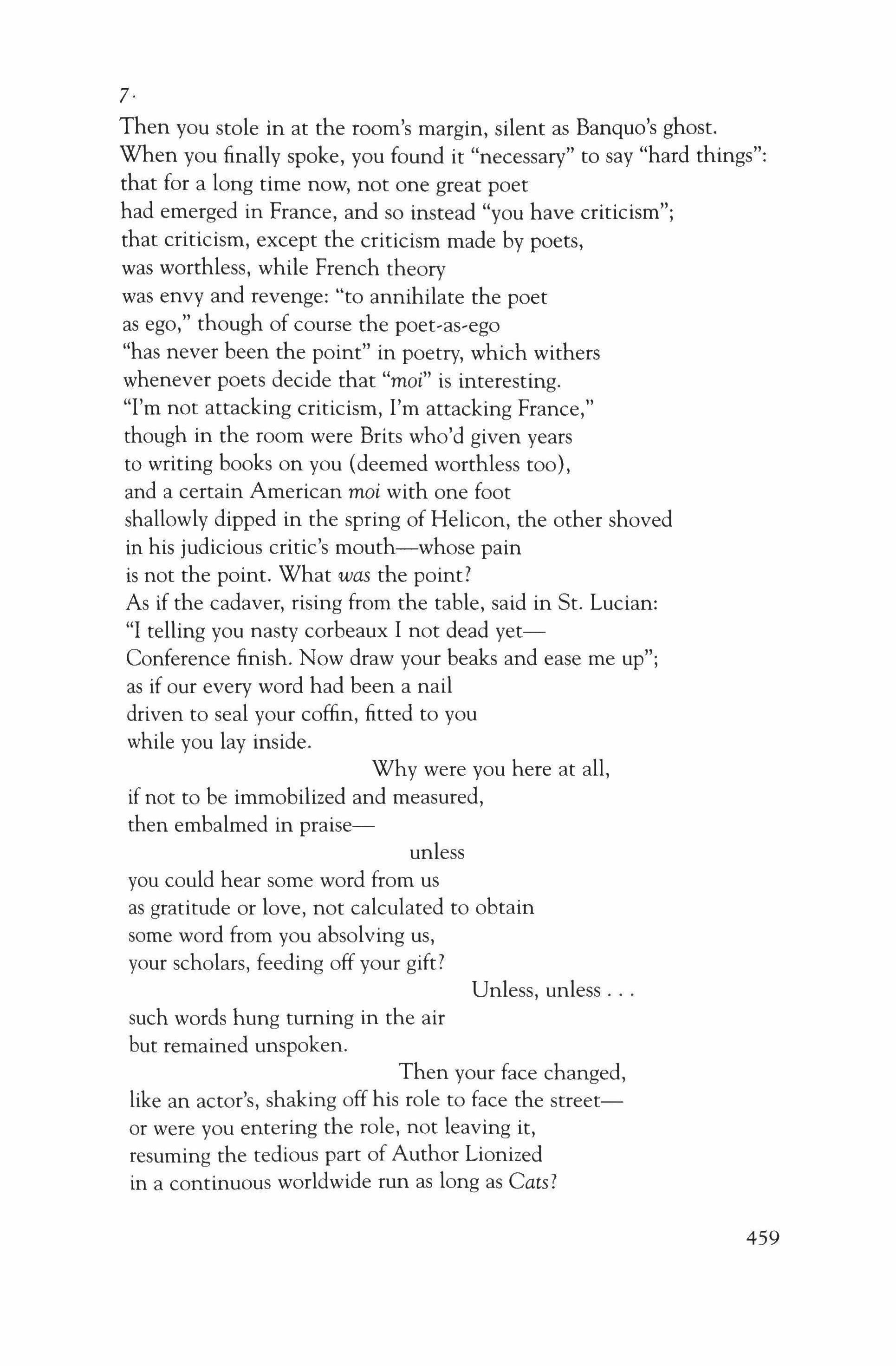
Then you stole in at the room's margin, silent as Banquo's ghost. When you finally spoke, you found it "necessary" to say "hard things": that for a long time now, not one great poet had emerged in France, and so instead "you have criticism"; that criticism, except the criticism made by poets, was worthless, while French theory was envy and revenge: "to annihilate the poet as ego," though of course the poet-as-ego "has never been the point" in poetry, which withers whenever poets decide that "moi" is interesting. "I'm not attacking criticism, I'm attacking France," though in the room were Brits who'd given years to writing books on you (deemed worthless too), and a certain American moi with one foot shallowly dipped in the spring of Helicon, the other shoved in his judicious critic's mouth-whose pain is not the point. What was the point?
As if the cadaver, rising from the table, said in St. Lucian: "I telling you nasty corbeaux 1 not dead yetConference finish. Now draw your beaks and ease me up"; as if our every word had been a nail driven to seal your coffin, fitted to you while you lay inside.
Why were you here at all, if not to be immobilized and measured, then embalmed in praiseunless you could hear some word from us as gratitude or love, not calculated to obtain some word from you absolving us, your scholars, feeding off your gift?
Unless, unless such words hung turning in the air but remained unspoken.
Then your face changed, like an actor's, shaking off his role to face the streetor were you entering the role, not leaving it, resuming the tedious part of Author Lionized in a continuous worldwide run as long as Cats?
7·
459
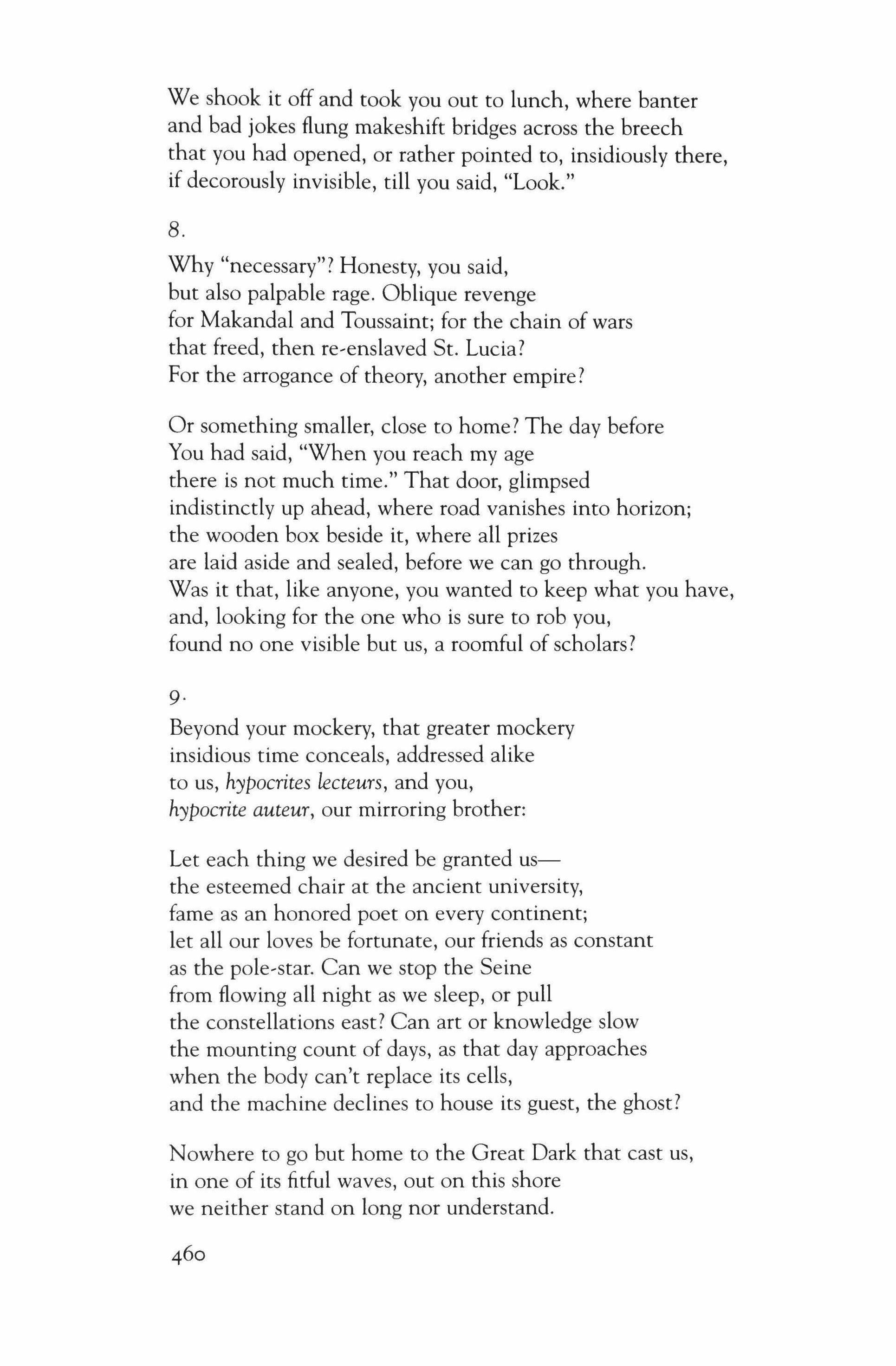
We shook it off and took you out to lunch, where banter and bad jokes flung makeshift bridges across the breech that you had opened, or rather pointed to, insidiously there, if decorously invisible, till you said, "Look."
8.
Why "necessary"? Honesty, you said, but also palpable rage. Oblique revenge for Makandal and Toussaint; for the chain of wars that freed, then re-enslaved St. Lucia? For the arrogance of theory, another empire?
Or something smaller, close to home? The day before You had said, "When you reach my age there is not much time." That door, glimpsed indistinctly up ahead, where road vanishes into horizon; the wooden box beside it, where all prizes are laid aside and sealed, before we can go through. Was it that, like anyone, you wanted to keep what you have, and, looking for the one who is sure to rob you, found no one visible but us, a roomful of scholars?
9·
Beyond your mockery, that greater mockery insidious time conceals, addressed alike to us, hypocrites lecteurs, and you, hypocrite auteur, our mirroring brother:
Let each thing we desired be granted usthe esteemed chair at the ancient university, fame as an honored poet on every continent; let all our loves be fortunate, our friends as constant as the pole-star, Can we stop the Seine from flowing all night as we sleep, or pull the constellations east? Can art or knowledge slow the mounting count of days, as that day approaches when the body can't replace its cells, and the machine declines to house its guest, the ghost?
Nowhere to go but home to the Great Dark that cast us, in one of its fitful waves, out on this shore we neither stand on long nor understand.
]osephine Yu
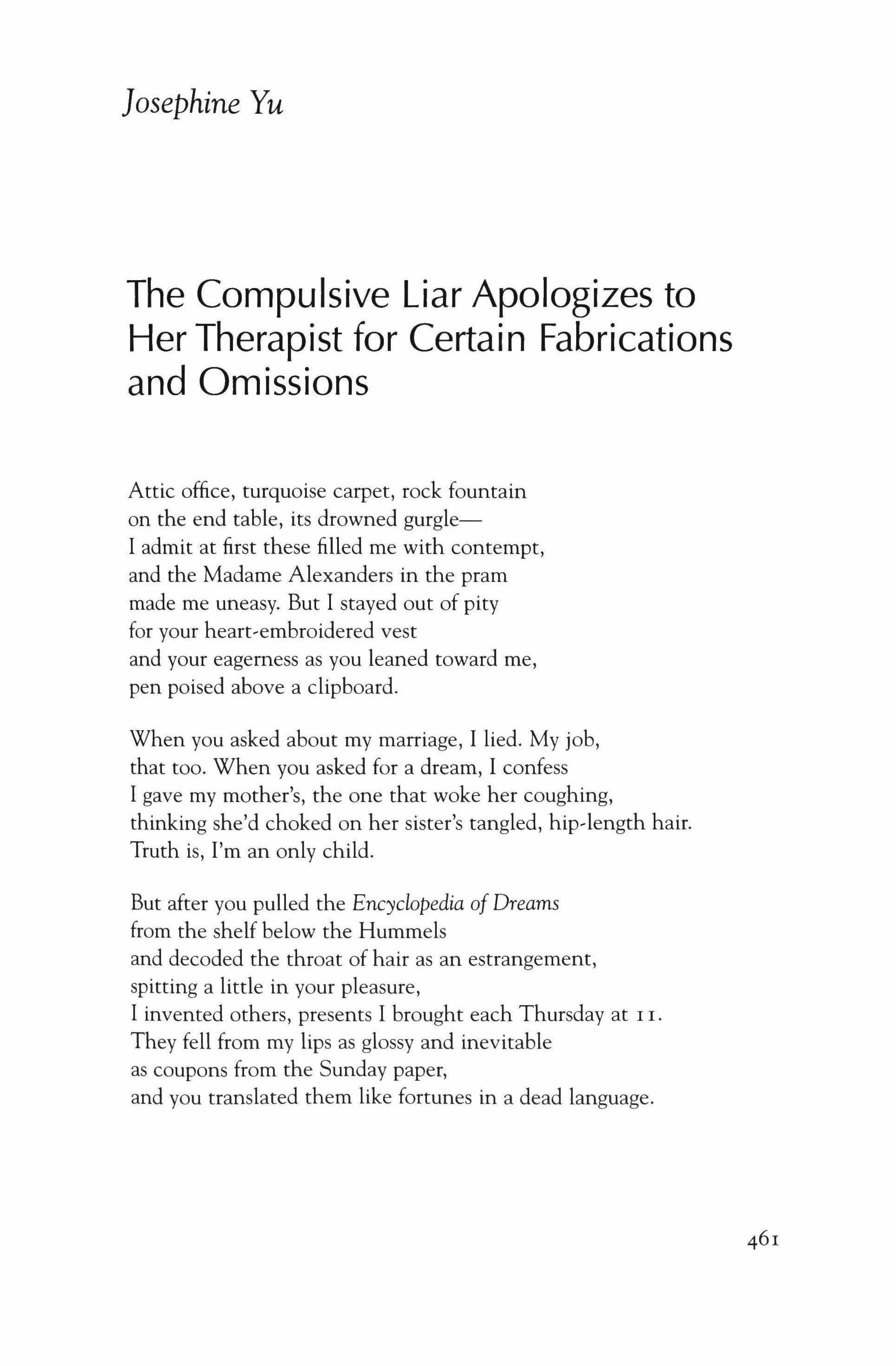
The Compulsive Liar Apologizes to Her Therapist for Certain Fabrications and Omissions
Attic office, turquoise carpet, rock fountain on the end table, its drowned gurgle1 admit at first these filled me with contempt, and the Madame Alexanders in the pram made me uneasy. But 1 stayed out of pity for your heart-embroidered vest and your eagerness as you leaned toward me, pen poised above a clipboard.
When you asked about my marriage, 1 lied. My job, that too. When you asked for a dream, I confess I gave my mother's, the one that woke her coughing, thinking she'd choked on her sister's tangled, hip-length hair. Truth is, I'm an only child.
But after you pulled the Encyclopedia of Dreams from the shelf below the Hummels and decoded the throat of hair as an estrangement, spitting a little in your pleasure, I invented others, presents I brought each Thursday at I I. They fell from my lips as glossy and inevitable as coupons from the Sunday paper, and you translated them like fortunes in a dead language.
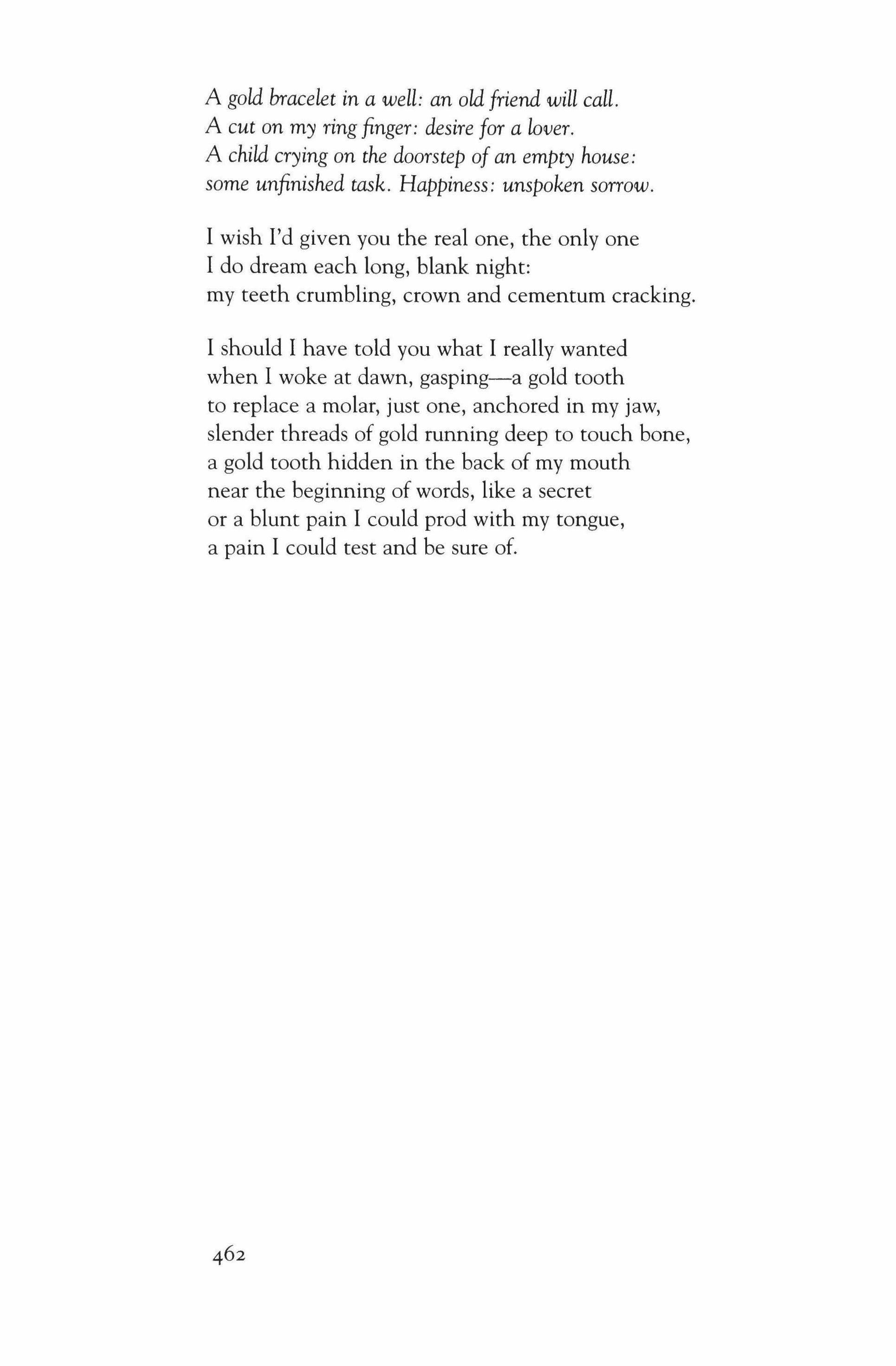
A gold bracelet in a well: an old friend will call. A cut on my ringfinger: desire for a lover. A child crying on the doorstep of an empty house: some unfinished task. Happiness: unspoken sorrow.
I wish I'd given you the real one, the only one I do dream each long, blank night: my teeth crumbling, crown and cementum cracking.
I should I have told you what I really wanted when I woke at dawn, gasping-a gold tooth to replace a molar, just one, anchored in my jaw, slender threads of gold running deep to touch bone, a gold tooth hidden in the back of my mouth near the beginning of words, like a secret or a blunt pain I could prod with my tongue, a pain I could test and be sure of.
Campbell McGrath
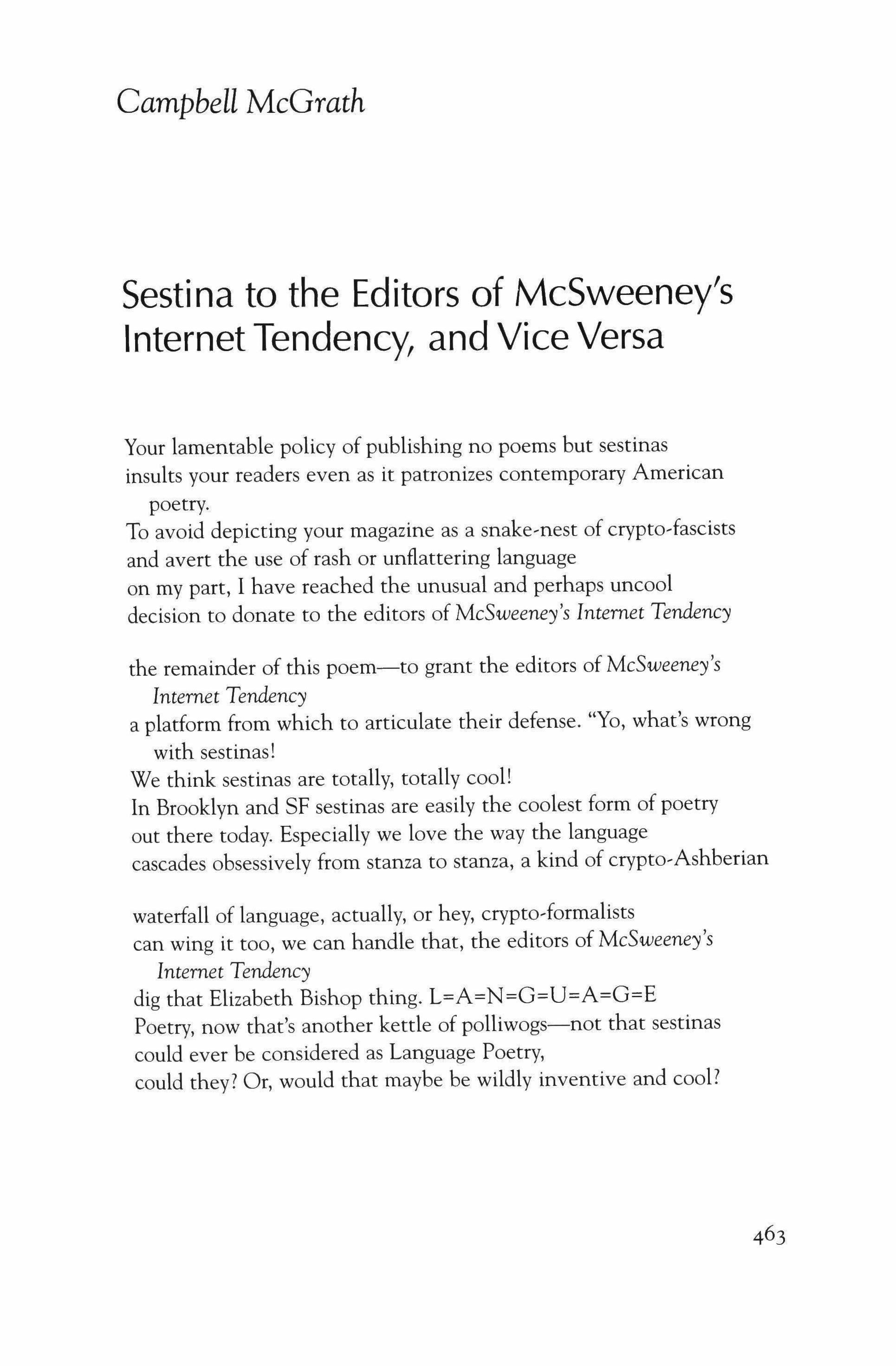
Sestina to the Editors of McSweeney's Internet Tendency, and Vice Versa
Your lamentable policy of publishing no poems but sestinas insults your readers even as it patronizes contemporary American poetry.
To avoid depicting your magazine as a snake-nest of crvpto-fascists and avert the use of rash or unflattering language on my part, I have reached the unusual and perhaps uncool decision to donate to the editors of McSweeney's Internet Tendency the remainder of this poem-to grant the editors of McSweeney's Internet Tendency a platform from which to articulate their defense. "Yo, what's wrong with sestinas!
We think sestinas are totally, totally cool! In Brooklyn and SF sestinas are easily the coolest form of poetry out there today. Especially we love the way the language cascades obsessively from stanza to stanza, a kind of crypto-Ashberian waterfall of language, actually, or hey, crypto-formalists can wing it too, we can handle that, the editors of McSweeney's Internet Tendency dig that Elizabeth Bishop thing. L=A=N=G=U=A=G=E Poetry, now that's another kettle of polliwogs-not that sestinas could ever be considered as Language Poetry, could they? Or, would that maybe be wildly inventive and cool?
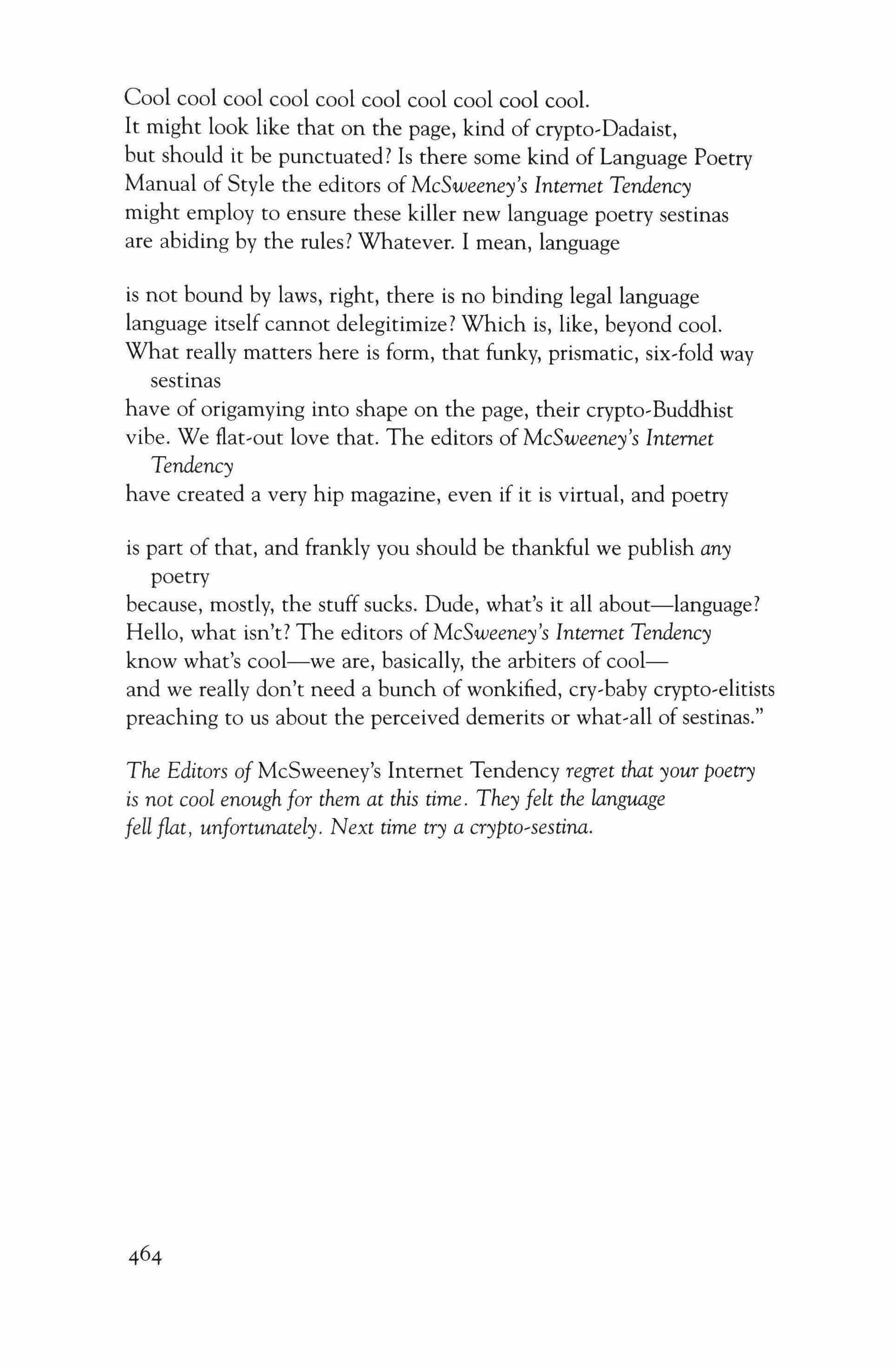
Cool cool cool cool cool cool cool cool cool cool. It might look like that on the page, kind of crypto-Dadaist, but should it be punctuated? Is there some kind of Language Poetry Manual of Style the editors of McSweeney's Internet Tendency might employ to ensure these killer new language poetry sestinas are abiding by the rules? Whatever. I mean, language
is not bound by laws, right, there is no binding legal language language itself cannot delegitimize? Which is, like, beyond cool. What really matters here is form, that funky, prismatic, six-fold way sestinas
have of origamying into shape on the page, their crypto-Buddhist vibe. We flat-out love that. The editors of McSweeney's Internet Tendency
have created a very hip magazine, even if it is virtual, and poetry is part of that, and frankly you should be thankful we publish any poetry because, mostly, the stuff sucks. Dude, what's it all about-language? Hello, what isn't? The editors of McSweeney's Internet Tendency know what's cool-we are, basically, the arbiters of cooland we really don't need a bunch of wonkified, cry-baby crypto-elitists preaching to us about the perceived demerits or what-all of sestinas."
The Editors of McSweeney's Internet Tendency regret that your poetry is not cool enough for them at this time. They felt the language fell flat, unfortunately. Next time try a crypto-sestina.
David Kirby
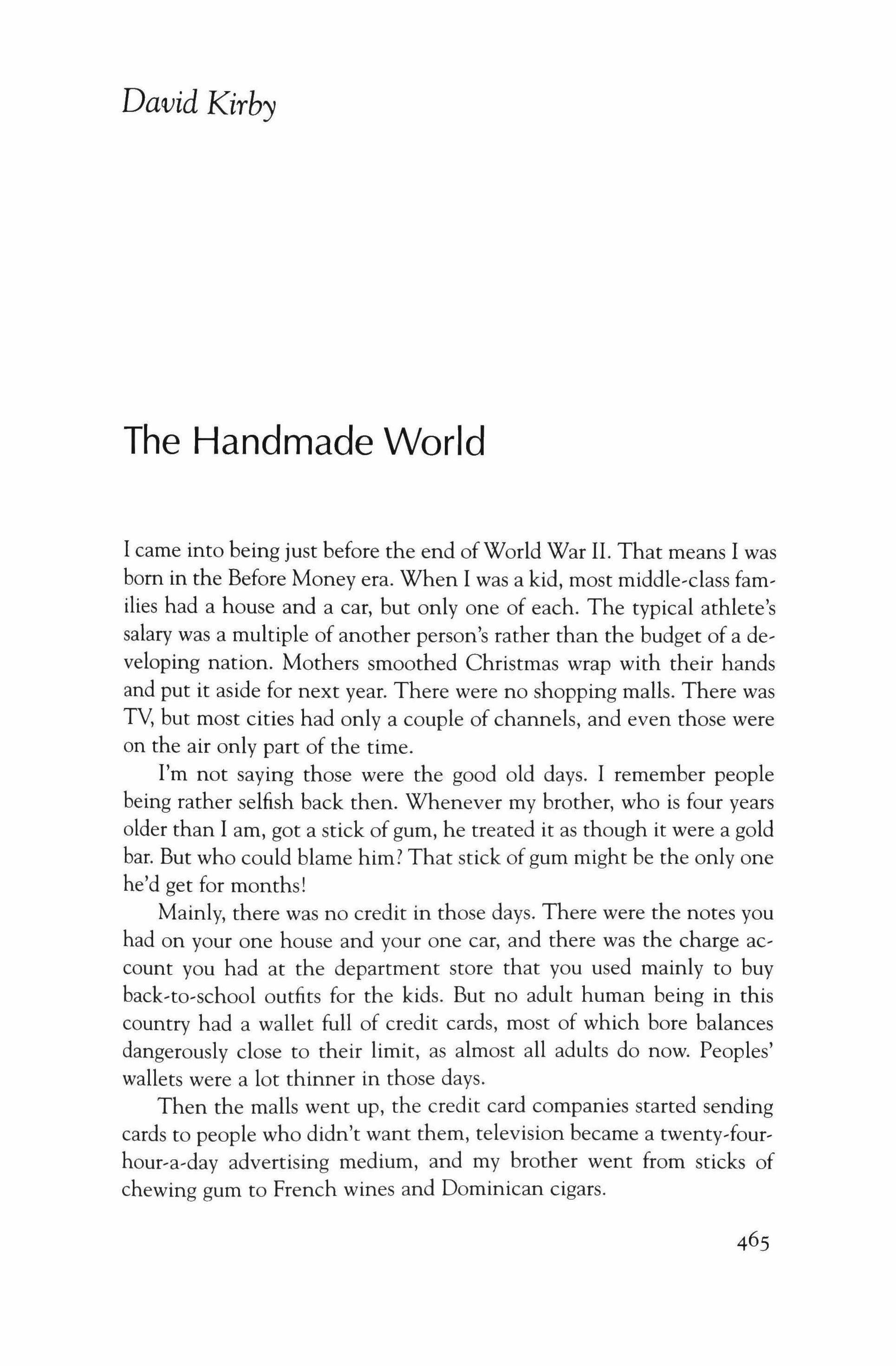
The Handmade World
I came into being just before the end ofWorld War II. That means I was born in the Before Money era. When I was a kid, most middle-class families had a house and a car, but only one of each. The typical athlete's salary was a multiple of another person's rather than the budget of a developing nation. Mothers smoothed Christmas wrap with their hands and put it aside for next year. There were no shopping malls. There was TV, but most cities had only a couple of channels, and even those were on the air only part of the time.
I'm not saying those were the good old days. I remember people being rather selfish back then. Whenever my brother, who is four years older than I am, got a stick of gum, he treated it as though it were a gold bar. But who could blame him? That stick of gum might be the only one he'd get for months!
Mainly, there was no credit in those days. There were the notes you had on your one house and your one car, and there was the charge account you had at the department store that you used mainly to buy back-to-school outfits for the kids. But no adult human being in this country had a wallet full of credit cards, most of which bore balances dangerously close to their limit, as almost all adults do now. Peoples' wallets were a lot thinner in those days.
Then the malls went up, the credit card companies started sending cards to people who didn't want them, television became a twenty-fourhour-a-day advertising medium, and my brother went from sticks of chewing gum to French wines and Dominican cigars.
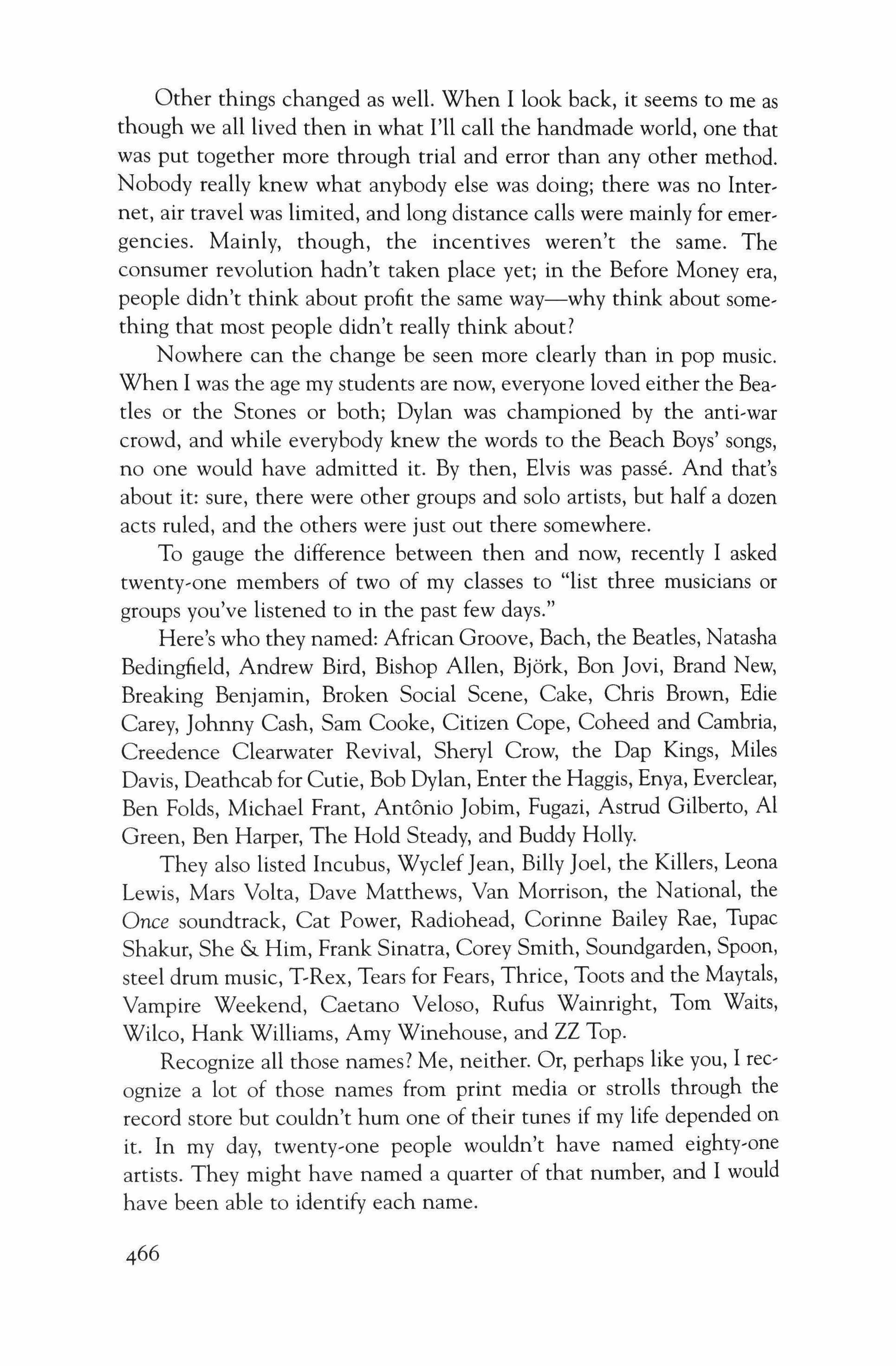
Other things changed as well. When I look back, it seems to me as though we all lived then in what I'll call the handmade world, one that was put together more through trial and error than any other method. Nobody really knew what anybody else was doing; there was no Internet, air travel was limited, and long distance calls were mainly for emergencies. Mainly, though, the incentives weren't the same. The consumer revolution hadn't taken place yet; in the Before Money era, people didn't think about profit the same way-why think about something that most people didn't really think about?
Nowhere can the change be seen more clearly than in pop music. When I was the age my students are now, everyone loved either the Beatles or the Stones or both; Dylan was championed by the anti-war crowd, and while everybody knew the words to the Beach Boys' songs, no one would have admitted it. By then, Elvis was passe. And that's about it: sure, there were other groups and solo artists, but half a dozen acts ruled, and the others were just out there somewhere.
To gauge the difference between then and now, recently I asked twenty-one members of two of my classes to "list three musicians or groups you've listened to in the past few days."
Here's who they named: African Groove, Bach, the Beatles, Natasha Bedingfield, Andrew Bird, Bishop Allen, Bjork, Bon [ovi, Brand New, Breaking Benjamin, Broken Social Scene, Cake, Chris Brown, Edie Carey, Johnny Cash, Sam Cooke, Citizen Cope, Coheed and Cambria, Creedence Clearwater Revival, Sheryl Crow, the Dap Kings, Miles Davis, Deathcab for Cutie, Bob Dylan, Enter the Haggis, Enya, Everclear, Ben Folds, Michael Frant, Antonio [obim, Fugazi, Astrud Gilberto, Al Green, Ben Harper, The Hold Steady, and Buddy Holly.
They also listed Incubus, WyclefJean, Billy Joel, the Killers, Leona Lewis, Mars Volta, Dave Matthews, Van Morrison, the National, the Once soundtrack, Cat Power, Radiohead, Corinne Bailey Rae, Tupac Shakur, She & Him, Frank Sinatra, Corey Smith, Soundgarden, Spoon, steel drum music, T-Rex, Tears for Fears, Thrice, Toots and the Maytals, Vampire Weekend, Caetano Veloso, Rufus Wainright, Tom Waits, Wilco, Hank Williams, Amy Winehouse, and ZZ Top.
Recognize all those names? Me, neither. Or, perhaps like you, I recognize a lot of those names from print media or strolls through the record store but couldn't hum one of their tunes if my life depended on it. In my day, twenty-one people wouldn't have named eighty-one artists. They might have named a quarter of that number, and I would have been able to identify each name.
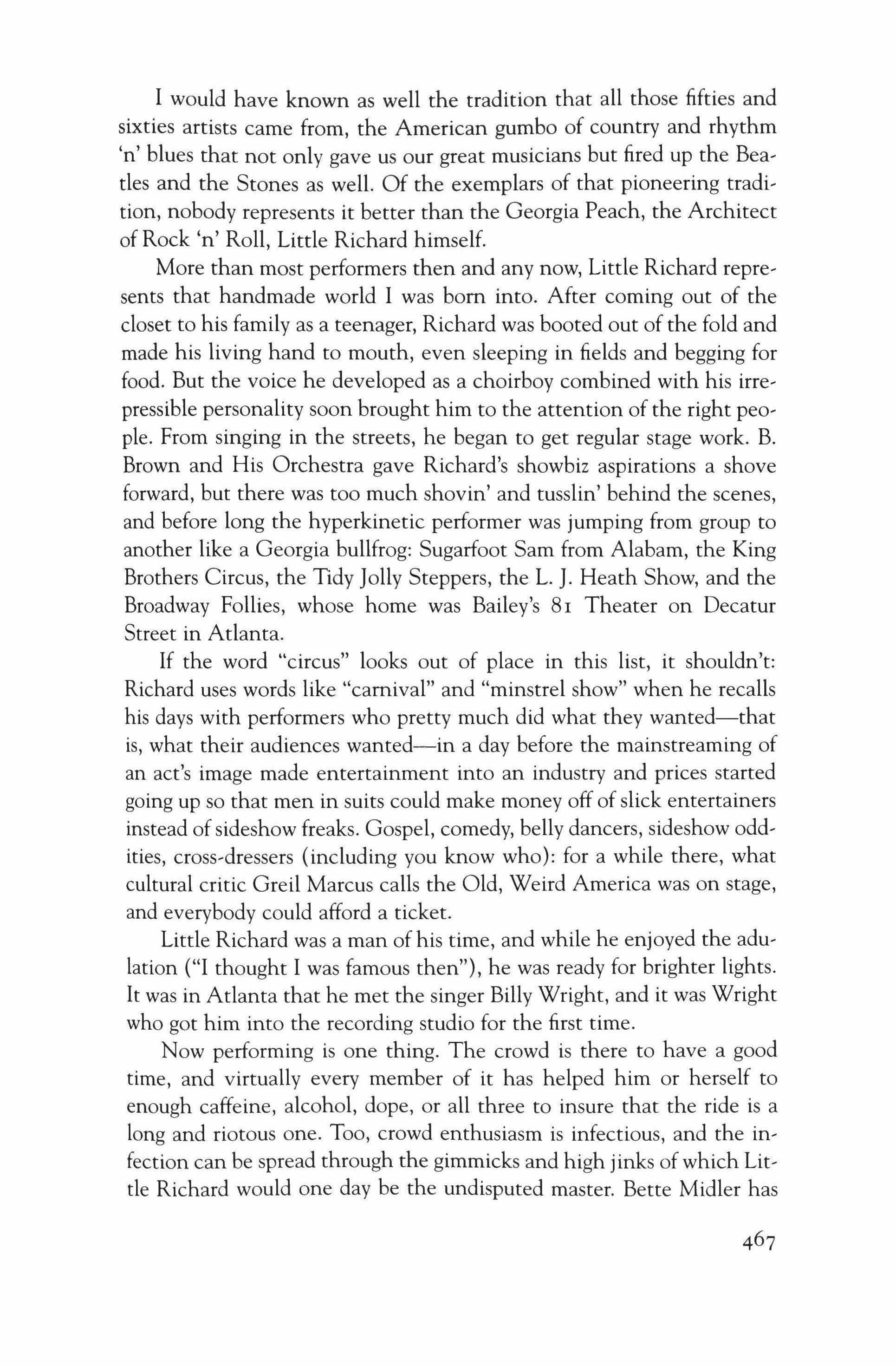
I would have known as well the tradition that all those fifties and sixties artists came from, the American gumbo of country and rhythm 'n' blues that not only gave us our great musicians but fired up the Beatles and the Stones as well. Of the exemplars of that pioneering tradition, nobody represents it better than the Georgia Peach, the Architect of Rock "n' Roll, Little Richard himself.
More than most performers then and any now, Little Richard represents that handmade world I was born into. After coming out of the closet to his family as a teenager, Richard was booted out of the fold and made his living hand to mouth, even sleeping in fields and begging for food. But the voice he developed as a choirboy combined with his irrepressible personality soon brought him to the attention of the right people. From singing in the streets, he began to get regular stage work. B. Brown and His Orchestra gave Richard's showbiz aspirations a shove forward, but there was too much shovin' and tusslin' behind the scenes, and before long the hyperkinetic performer was jumping from group to another like a Georgia bullfrog: Sugarfoot Sam from Alabam, the King Brothers Circus, the Tidy Jolly Steppers, the L. J. Heath Show, and the Broadway Follies, whose home was Bailey's 8 I Theater on Decatur Street in Atlanta.
If the word "circus" looks out of place in this list, it shouldn't: Richard uses words like "carnival" and "minstrel show" when he recalls his days with performers who pretty much did what they wanted-that is, what their audiences wanted-in a day before the mainstreaming of an act's image made entertainment into an industry and prices started going up so that men in suits could make money off of slick entertainers instead of sideshow freaks. Gospel, comedy, belly dancers, sideshow oddities, cross-dressers (including you know who): for a while there, what cultural critic Greil Marcus calls the Old, Weird America was on stage, and everybody could afford a ticket.
Little Richard was a man of his time, and while he enjoyed the adulation ("I thought I was famous then"), he was ready for brighter lights. It was in Atlanta that he met the singer Billy Wright, and it was Wright who got him into the recording studio for the first time.
Now performing is one thing. The crowd is there to have a good time, and virtually every member of it has helped him or herself to enough caffeine, alcohol, dope, or all three to insure that the ride is a long and riotous one. Too, crowd enthusiasm is infectious, and the infection can be spread through the gimmicks and high jinks of which Little Richard would one day be the undisputed master. Bette Midler has
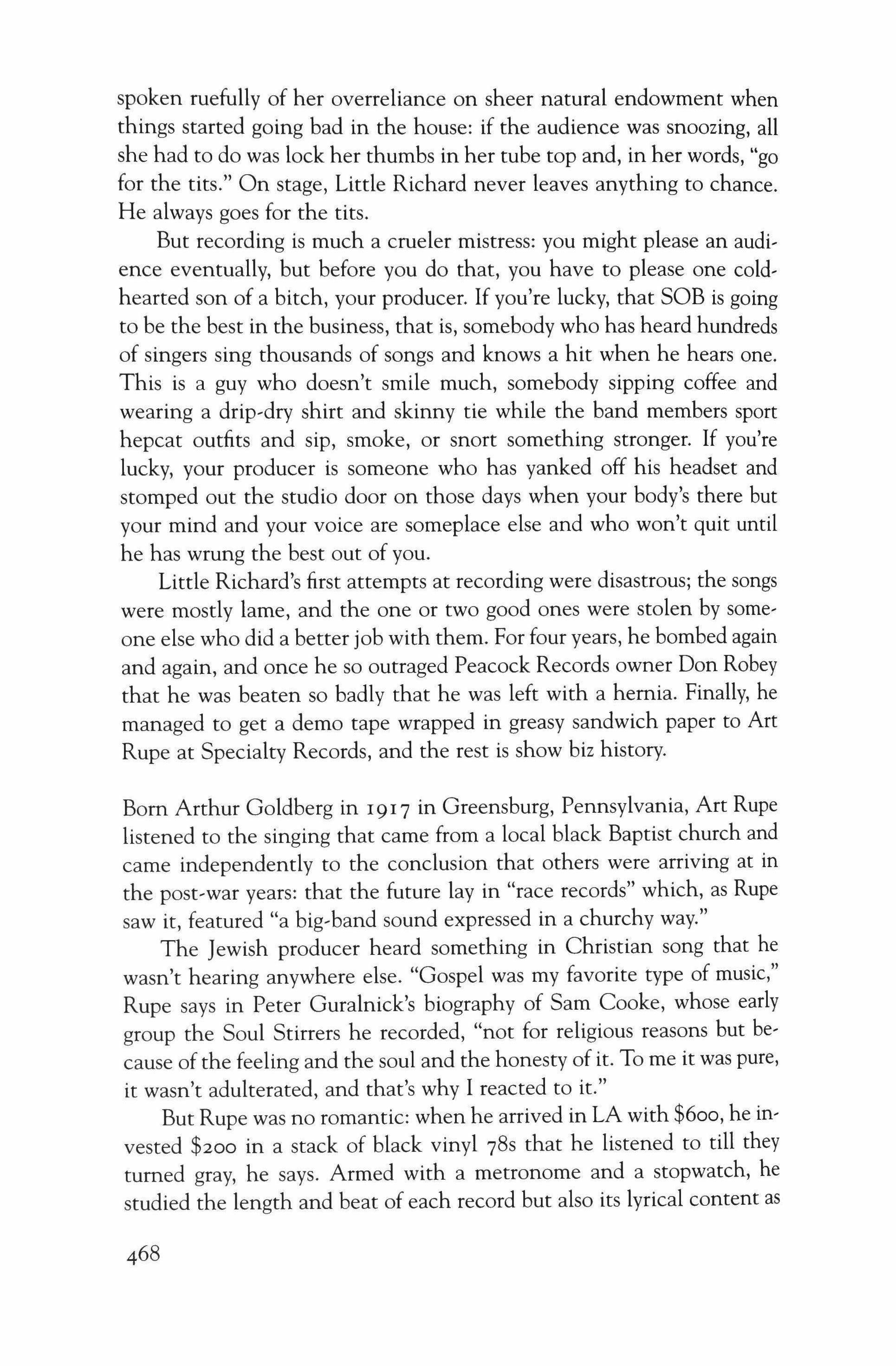
spoken ruefully of her overreliance on sheer natural endowment when things started going bad in the house: if the audience was snoozing, all she had to do was lock her thumbs in her tube top and, in her words, "go for the tits." On stage, Little Richard never leaves anything to chance. He always goes for the tits.
But recording is much a crueler mistress: you might please an audience eventually, but before you do that, you have to please one coldhearted son of a bitch, your producer. If you're lucky, that SOB is going to be the best in the business, that is, somebody who has heard hundreds of singers sing thousands of songs and knows a hit when he hears one. This is a guy who doesn't smile much, somebody sipping coffee and wearing a drip-dry shirt and skinny tie while the band members sport hepcat outfits and sip, smoke, or snort something stronger. If you're lucky, your producer is someone who has yanked off his headset and stomped out the studio door on those days when your body's there but your mind and your voice are someplace else and who won't quit until he has wrung the best out of you.
Little Richard's first attempts at recording were disastrous; the songs were mostly lame, and the one or two good ones were stolen by someone else who did a better job with them. For four years, he bombed again and again, and once he so outraged Peacock Records owner Don Robey that he was beaten so badly that he was left with a hernia. Finally, he managed to get a demo tape wrapped in greasy sandwich paper to Art Rupe at Specialty Records, and the rest is show biz history.
Born Arthur Goldberg in I917 in Greensburg, Pennsylvania, Art Rupe listened to the singing that came from a local black Baptist church and came independently to the conclusion that others were arriving at in the post-war years: that the future lay in "race records" which, as Rupe saw it, featured "a big-band sound expressed in a churchy way."
The Jewish producer heard something in Christian song that he wasn't hearing anywhere else. "Gospel was my favorite type of music," Rupe says in Peter Guralnick's biography of Sam Cooke, whose early group the Soul Stirrers he recorded, "not for religious reasons but because of the feeling and the soul and the honesty of it. To me it was pure, it wasn't adulterated, and that's why I reacted to it."
But Rupe was no romantic: when he arrived in LA with $600, he invested $200 in a stack of black vinyl 78s that he listened to till they turned gray, he says. Armed with a metronome and a stopwatch, he studied the length and beat of each record but also its lyrical content as
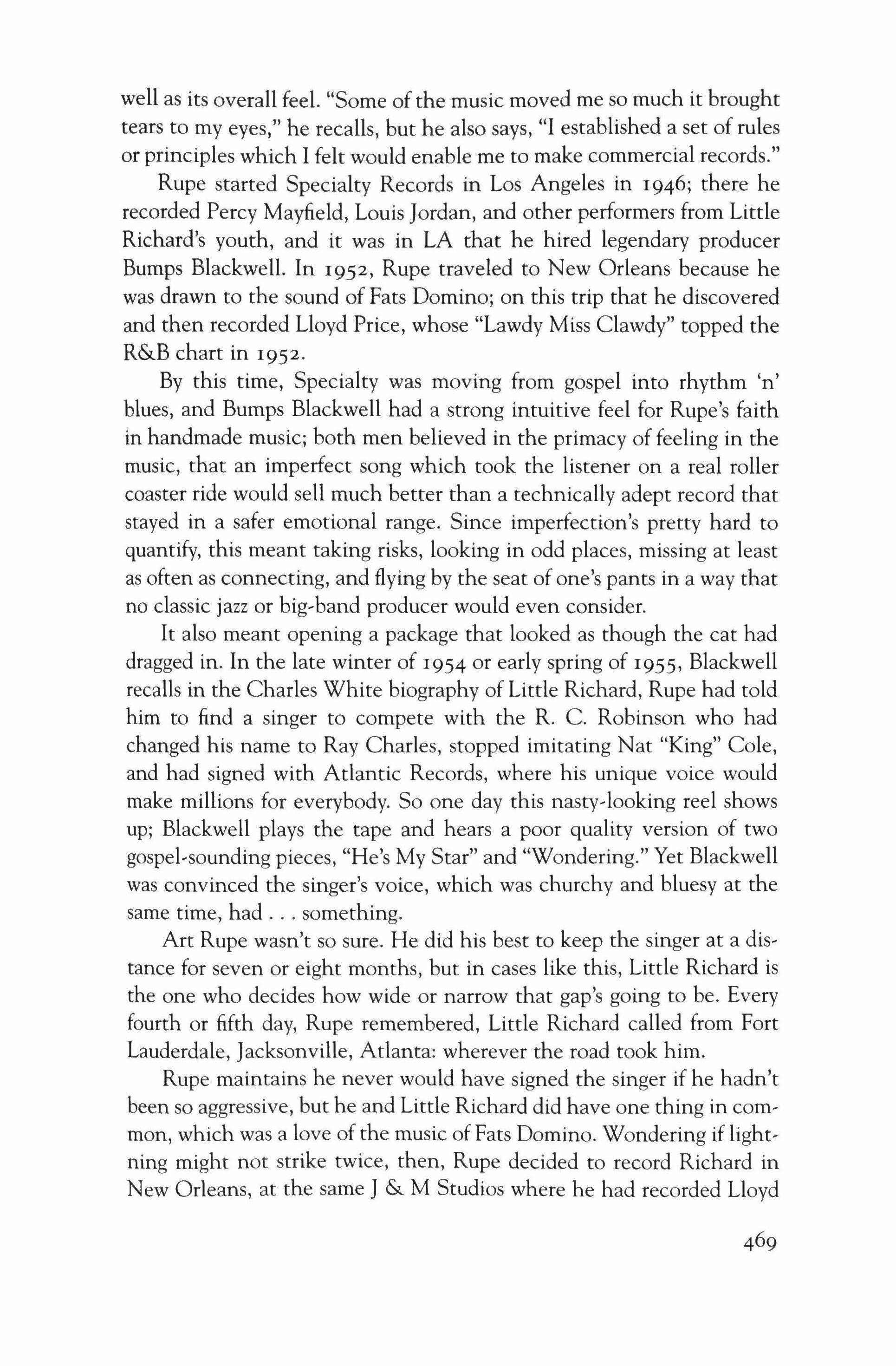
well as its overall feel. "Some of the music moved me so much it brought tears to my eyes," he recalls, but he also says, "I established a set of rules or principles which I felt would enable me to make commercial records."
Rupe started Specialty Records in Los Angeles in 1946; there he recorded Percy Mayfield, Louis Jordan, and other performers from Little Richard's youth, and it was in LA that he hired legendary producer Bumps Blackwell. In 1952, Rupe traveled to New Orleans because he was drawn to the sound of Fats Domino; on this trip that he discovered and then recorded Lloyd Price, whose "Lawdy Miss Clawdy" topped the R&B chart in 1952.
By this time, Specialty was moving from gospel into rhythm 'n' blues, and Bumps Blackwell had a strong intuitive feel for Rupe's faith in handmade music; both men believed in the primacy of feeling in the music, that an imperfect song which took the listener on a real roller coaster ride would sell much better than a technically adept record that stayed in a safer emotional range. Since imperfection's pretty hard to quantify, this meant taking risks, looking in odd places, missing at least as often as connecting, and flying by the seat of one's pants in a way that no classic jazz or big-band producer would even consider.
It also meant opening a package that looked as though the cat had dragged in. In the late winter of 1954 or early spring of 1955, Blackwell recalls in the Charles White biography of Little Richard, Rupe had told him to find a singer to compete with the R. C. Robinson who had changed his name to Ray Charles, stopped imitating Nat "King" Cole, and had signed with Atlantic Records, where his unique voice would make millions for everybody. So one day this nasty-looking reel shows up; Blackwell plays the tape and hears a poor quality version of two gospel-sounding pieces, "He's My Star" and "Wondering." Yet Blackwell was convinced the singer's voice, which was churchy and bluesy at the same time, had something.
Art Rupe wasn't so sure. He did his best to keep the singer at a distance for seven or eight months, but in cases like this, Little Richard is the one who decides how wide or narrow that gap's going to be. Every fourth or fifth day, Rupe remembered, Little Richard called from Fort Lauderdale, Jacksonville, Atlanta: wherever the road took him.
Rupe maintains he never would have signed the singer if he hadn't been so aggressive, but he and Little Richard did have one thing in common, which was a love of the music of Fats Domino. Wondering if lightning might not strike twice, then, Rupe decided to record Richard in New Orleans, at the same J & M Studios where he had recorded Lloyd
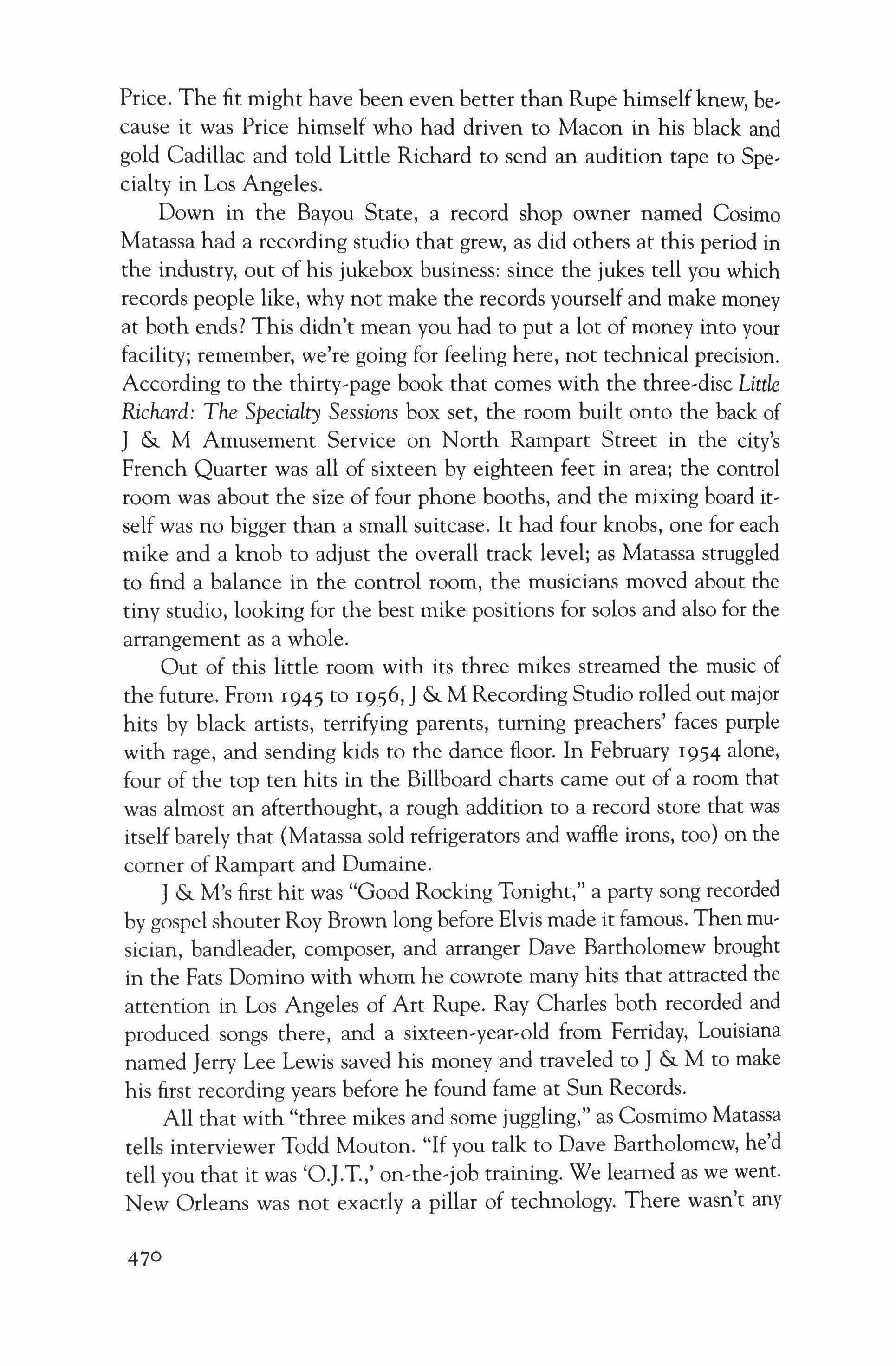
Price. The fit might have been even better than Rupe himself knew, because it was Price himself who had driven to Macon in his black and gold Cadillac and told Little Richard to send an audition tape to Specialty in Los Angeles.
Down in the Bayou State, a record shop owner named Cosimo Matassa had a recording studio that grew, as did others at this period in the industry, out of his jukebox business: since the jukes tell you which records people like, why not make the records yourself and make money at both ends? This didn't mean you had to put a lot of money into your facility; remember, we're going for feeling here, not technical precision. According to the thirty-page book that comes with the three-disc Little Richard: The Specialty Sessions box set, the room built onto the back of J & M Amusement Service on North Rampart Street in the city's French Quarter was all of sixteen by eighteen feet in area; the control room was about the size of four phone booths, and the mixing board itself was no bigger than a small suitcase. It had four knobs, one for each mike and a knob to adjust the overall track level; as Matassa struggled to find a balance in the control room, the musicians moved about the tiny studio, looking for the best mike positions for solos and also for the arrangement as a whole.
Out of this little room with its three mikes streamed the music of the future. From 1945 to 1956, J & M Recording Studio rolled out major hits by black artists, terrifying parents, turning preachers' faces purple with rage, and sending kids to the dance floor. In February 1954 alone, four of the top ten hits in the Billboard charts came out of a room that was almost an afterthought, a rough addition to a record store that was itself barely that (Matassa sold refrigerators and waffle irons, too) on the comer of Rampart and Dumaine.
J & M's first hit was "Good Rocking Tonight," a party song recorded by gospel shouter Roy Brown long before Elvis made it famous. Then musician, bandleader, composer, and arranger Dave Bartholomew brought in the Fats Domino with whom he cowrote many hits that attracted the attention in Los Angeles of Art Rupe. Ray Charles both recorded and produced songs there, and a sixteen-year-old from Ferriday, Louisiana named Jerry Lee Lewis saved his money and traveled to J & M to make his first recording years before he found fame at Sun Records.
All that with "three mikes and some juggling," as Cosmimo Matassa tells interviewer Todd Mouton. "If you talk to Dave Bartholomew, he'd tell you that it was 'O.J.T.,' on-the-job training. We learned as we went. New Orleans was not exactly a pillar of technology. There wasn't any
470
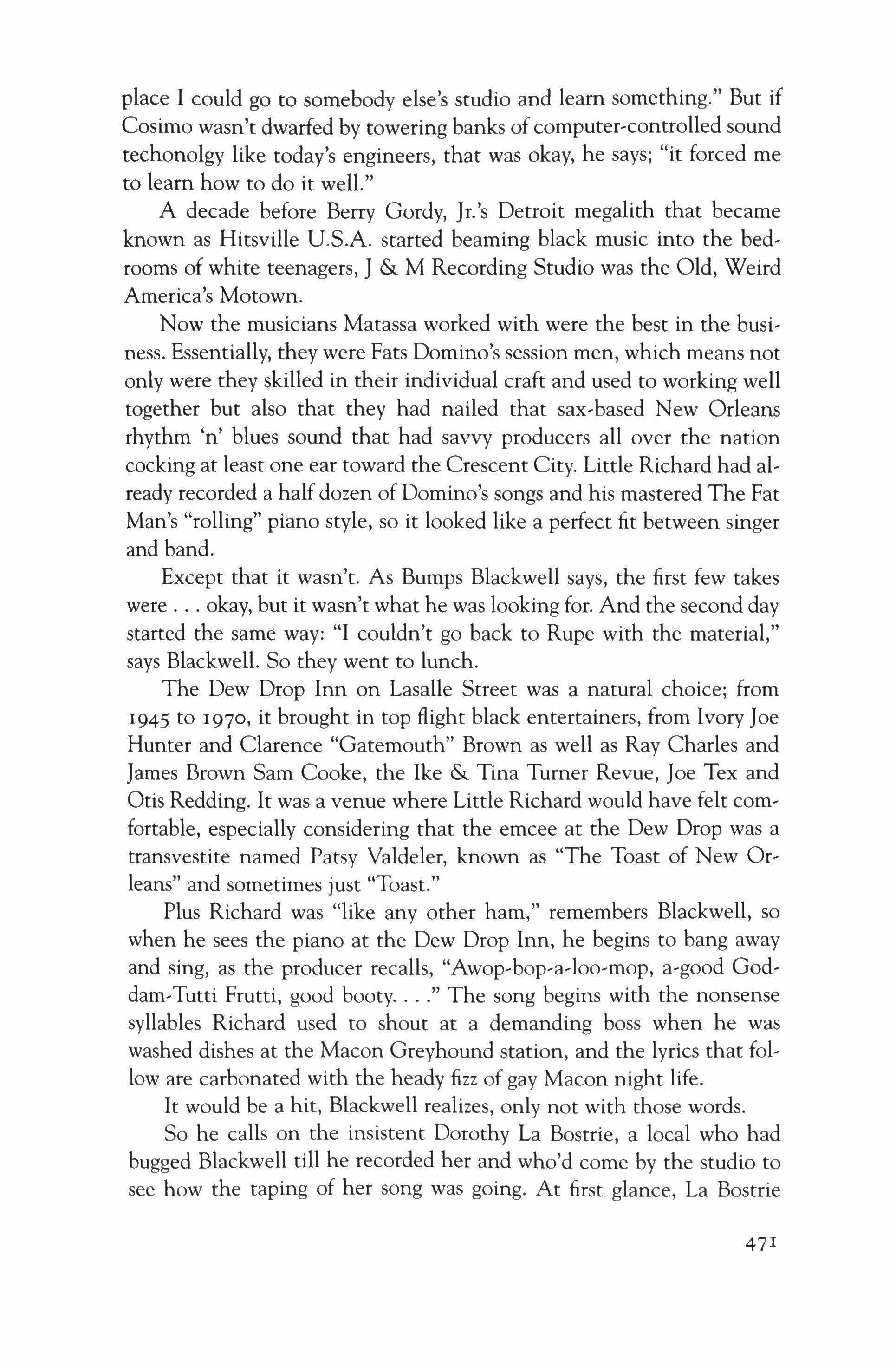
place I could go to somebody else's studio and learn something." But if Cosirno wasn't dwarfed by towering banks ofcomputer,controlled sound techonolgy like today's engineers, that was okay, he says; "it forced me to learn how to do it well."
A decade before Berry Gordy, Jr.'s Detroit megalith that became known as Hitsville U.S.A. started beaming black music into the bed, rooms of white teenagers, J & M Recording Studio was the Old, Weird America's Motown.
Now the musicians Matassa worked with were the best in the business. Essentially, they were Fats Domino's session men, which means not only were they skilled in their individual craft and used to working well together but also that they had nailed that sax-based New Orleans rhythm 'n' blues sound that had savvy producers all over the nation cocking at least one ear toward the Crescent City. Little Richard had already recorded a half dozen of Domino's songs and his mastered The Fat Man's "rolling" piano style, so it looked like a perfect fit between singer and band.
Except that it wasn't. As Bumps Blackwell says, the first few takes were okay, but it wasn't what he was looking for. And the second day started the same way: "I couldn't go back to Rupe with the material," says Blackwell. So they went to lunch.
The Dew Drop Inn on Lasalle Street was a natural choice; from 1945 to 1970, it brought in top flight black entertainers, from Ivory Joe Hunter and Clarence "Gatemouth" Brown as well as Ray Charles and James Brown Sam Cooke, the Ike & Tina Turner Revue, Joe Tex and Otis Redding. It was a venue where Little Richard would have felt corn' fortable, especially considering that the emcee at the Dew Drop was a transvestite named Patsy Valdeler, known as "The Toast of New Or, leans" and sometimes just "Toast."
Plus Richard was "like any other ham," remembers Blackwell, so when he sees the piano at the Dew Drop Inn, he begins to bang away and sing, as the producer recalls, "Awop-bop-a-loo-rnop, a-good God, dam-Tutti Frutti, good booty The song begins with the nonsense syllables Richard used to shout at a demanding boss when he was washed dishes at the Macon Greyhound station, and the lyrics that follow are carbonated with the heady fizz of gay Macon night life.
It would be a hit, Blackwell realizes, only not with those words.
So he calls on the insistent Dorothy La Bostrie, a local who had bugged Blackwell till he recorded her and who'd corne by the studio to see how the taping of her song was going. At first glance, La Bostrie
471
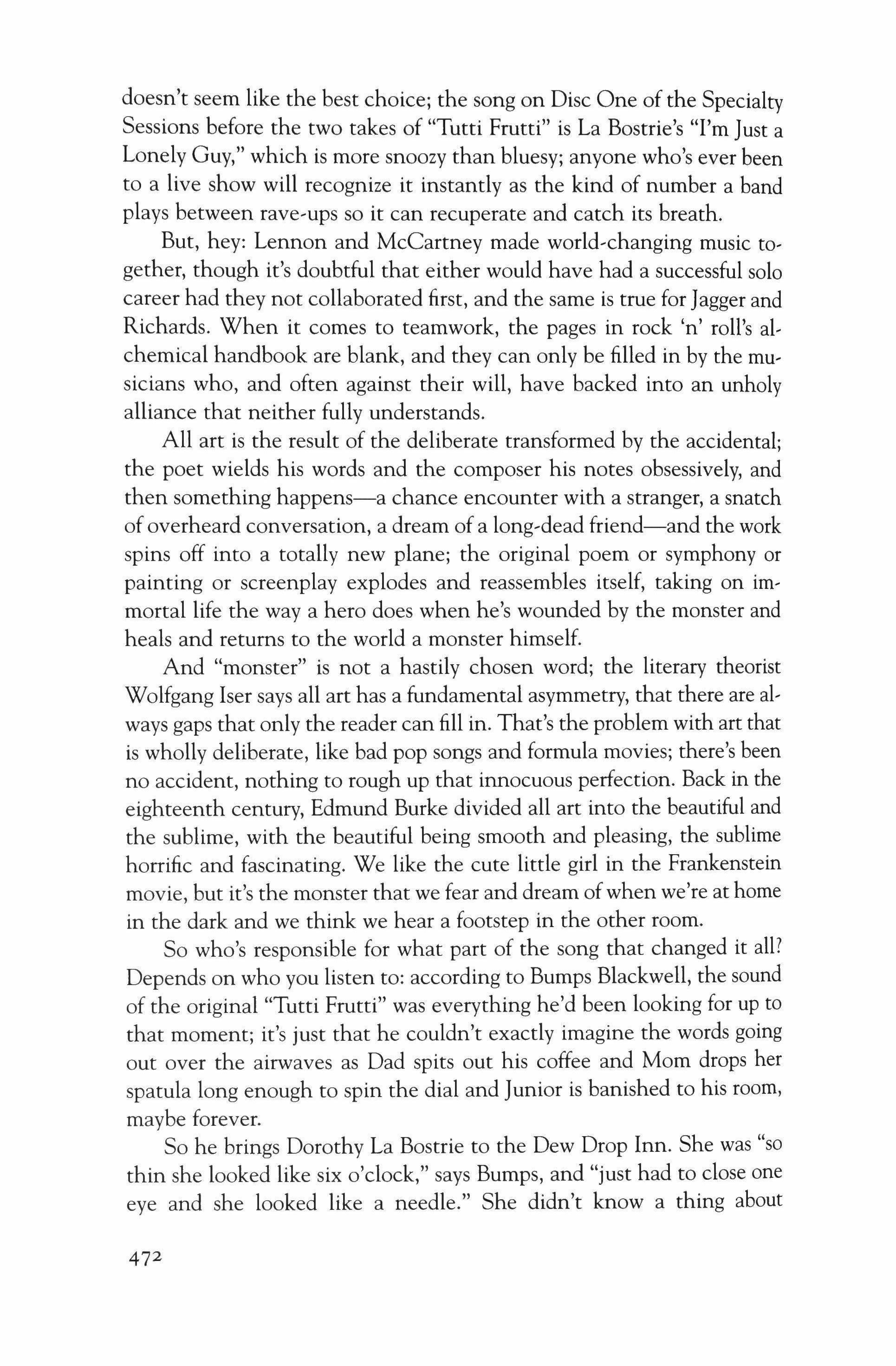
doesn't seem like the best choice; the song on Disc One of the Specialty Sessions before the two takes of "Tutti Frutti" is La Bostrie's "I'm Just a Lonely Guy," which is more snoozy than bluesy; anyone who's ever been to a live show will recognize it instantly as the kind of number a band plays between rave-ups so it can recuperate and catch its breath.
But, hey: Lennon and McCartney made world-changing music together, though it's doubtful that either would have had a successful solo career had they not collaborated first, and the same is true for Jagger and Richards. When it comes to teamwork, the pages in rock 'n' roll's alchemical handbook are blank, and they can only be filled in by the musicians who, and often against their will, have backed into an unholy alliance that neither fully understands.
All art is the result of the deliberate transformed by the accidental; the poet wields his words and the composer his notes obsessively, and then something happens-a chance encounter with a stranger, a snatch ofoverheard conversation, a dream of a long-dead friend-and the work spins off into a totally new plane; the original poem or symphony or painting or screenplay explodes and reassembles itself, taking on immortal life the way a hero does when he's wounded by the monster and heals and returns to the world a monster himself.
And "monster" is not a hastily chosen word; the literary theorist Wolfgang Iser says all art has a fundamental asymmetry, that there are always gaps that only the reader can fill in. That's the problem with art that is wholly deliberate, like bad pop songs and formula movies; there's been no accident, nothing to rough up that innocuous perfection. Back in the eighteenth century, Edmund Burke divided all art into the beautiful and the sublime, with the beautiful being smooth and pleasing, the sublime horrific and fascinating. We like the cute little girl in the Frankenstein movie, but it's the monster that we fear and dream ofwhen we're at home in the dark and we think we hear a footstep in the other room.
So who's responsible for what part of the song that changed it all?
Depends on who you listen to: according to Bumps Blackwell, the sound of the original "Tutti Frutti" was everything he'd been looking for up to that moment; it's just that he couldn't exactly imagine the words going out over the airwaves as Dad spits out his coffee and Mom drops her spatula long enough to spin the dial and Junior is banished to his room, maybe forever.
So he brings Dorothy La Bostrie to the Dew Drop Inn. She was "so thin she looked like six o'clock," says Bumps, and "just had to close one eye and she looked like a needle." She didn't know a thing about
472
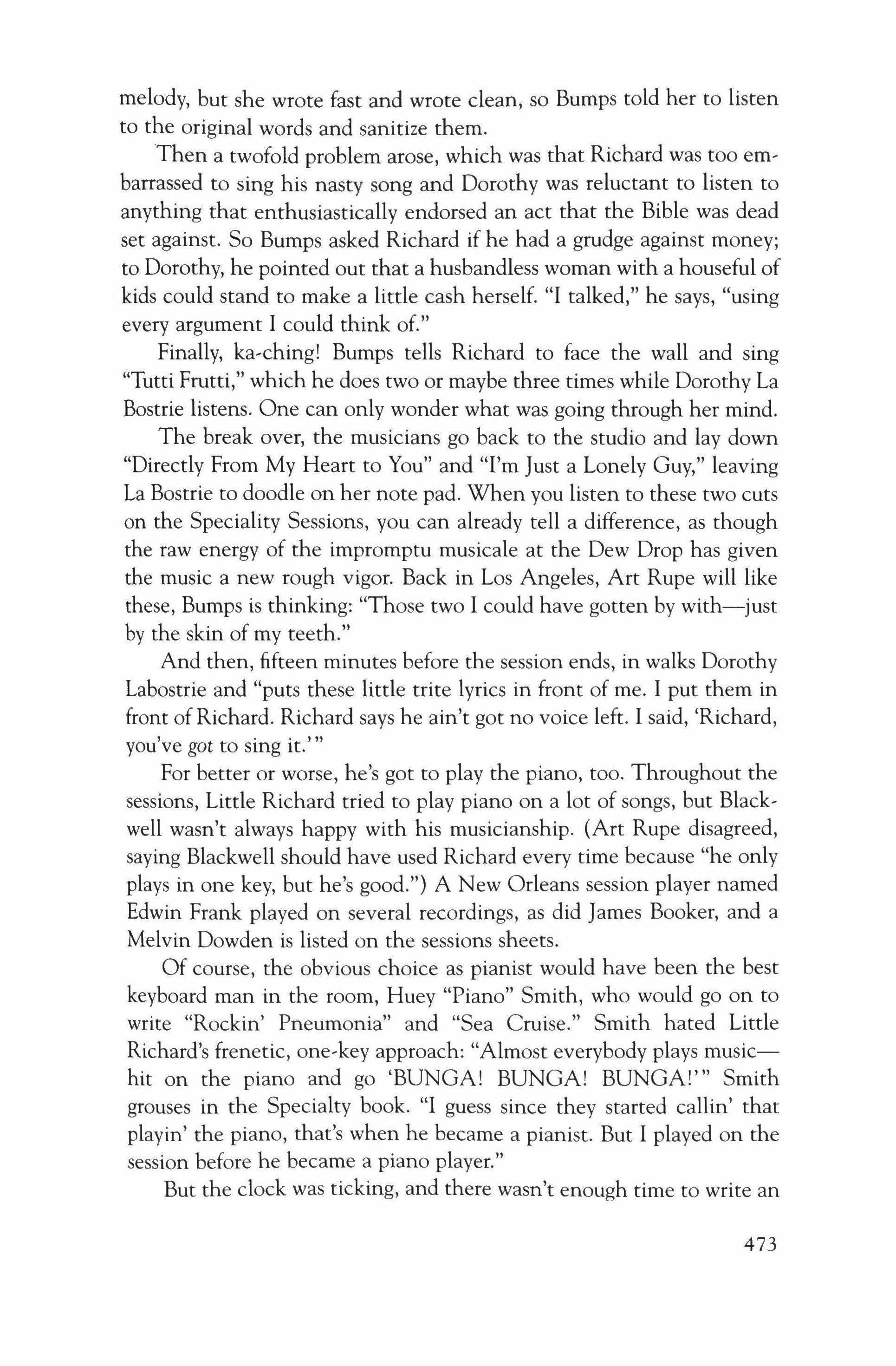
melody, but she wrote fast and wrote clean, so Bumps told her to listen to the original words and sanitize them.
Then a twofold problem arose, which was that Richard was too embarrassed to sing his nasty song and Dorothy was reluctant to listen to anything that enthusiastically endorsed an act that the Bible was dead set against. So Bumps asked Richard if he had a grudge against money; to Dorothy, he pointed out that a husbandless woman with a houseful of kids could stand to make a little cash herself. "I talked," he says, "using every argument I could think of."
Finally, ka-chingl Bumps tells Richard to face the wall and sing "Tutti Frutti," which he does two or maybe three times while Dorothy La Bostrie listens. One can only wonder what was going through her mind.
The break over, the musicians go back to the studio and lay down "Directly From My Heart to You" and "I'm Just a Lonely Guy," leaving La Bostrie to doodle on her note pad. When you listen to these two cuts on the Speciality Sessions, you can already tell a difference, as though the raw energy of the impromptu musicale at the Dew Drop has given the music a new rough vigor. Back in Los Angeles, Art Rupe will like these, Bumps is thinking: "Those two I could have gotten by with-just by the skin of my teeth."
And then, fifteen minutes before the session ends, in walks Dorothy Labostrie and "puts these little trite lyrics in front of me. I put them in front of Richard. Richard says he ain't got no voice left. I said, 'Richard, you've got to sing it.'"
For better or worse, he's got to play the piano, too. Throughout the sessions, Little Richard tried to play piano on a lot of songs, but Blackwell wasn't always happy with his musicianship. (Art Rupe disagreed, saying Blackwell should have used Richard every time because "he only plays in one key, but he's good.") A New Orleans session player named Edwin Frank played on several recordings, as did James Booker, and a Melvin Dowden is listed on the sessions sheets.
Of course, the obvious choice as pianist would have been the best keyboard man in the room, Huey "Piano" Smith, who would go on to write "Rockin' Pneumonia" and "Sea Cruise." Smith hated Little Richard's frenetic, one-key approach: "Almost everybody plays musichit on the piano and go 'BUNGA! BUNGA! BUNGA!'" Smith grouses in the Specialty book. "I guess since they started callin' that playin' the piano, that's when he became a pianist. But I played on the session before he became a piano player."
But the clock was ticking, and there wasn't enough time to write an
473
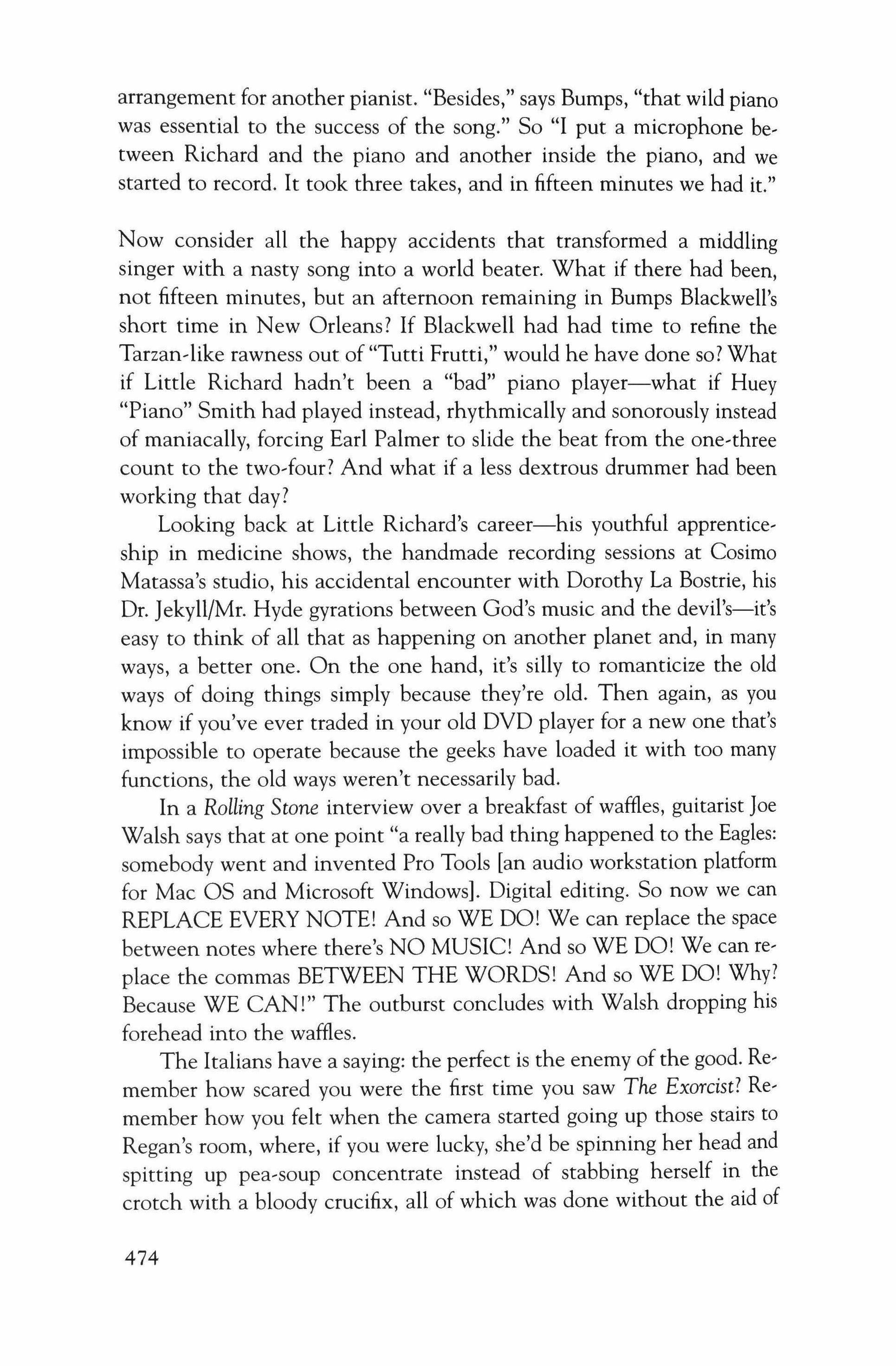
arrangement for another pianist. "Besides," says Bumps, "that wild piano was essential to the success of the song." So "I put a microphone between Richard and the piano and another inside the piano, and we started to record. It took three takes, and in fifteen minutes we had it."
Now consider all the happy accidents that transformed a middling singer with a nasty song into a world beater. What if there had been, not fifteen minutes, but an afternoon remaining in Bumps Blackwell's short time in New Orleans? If Blackwell had had time to refine the Tarzan-like rawness out of "Tutti Frutti," would he have done so? What if Little Richard hadn't been a "bad" piano player-what if Huey "Piano" Smith had played instead, rhythmically and sonorously instead of maniacally, forcing Earl Palmer to slide the beat from the one-three count to the two-four? And what if a less dextrous drummer had been working that day?
Looking back at Little Richard's career-his youthful apprenticeship in medicine shows, the handmade recording sessions at Cosimo Matassa's studio, his accidental encounter with Dorothy La Bostrie, his Dr. Jekyll/Mr. Hyde gyrations between God's music and the devil's-it's easy to think of all that as happening on another planet and, in many ways, a better one. On the one hand, it's silly to romanticize the old ways of doing things simply because they're old. Then again, as you know if you've ever traded in your old DVD player for a new one that's impossible to operate because the geeks have loaded it with too many functions, the old ways weren't necessarily bad.
In a Rolling Stone interview over a breakfast of waffles, guitarist Joe Walsh says that at one point "a really bad thing happened to the Eagles: somebody went and invented Pro Tools [an audio workstation platform for Mac OS and Microsoft Windows]. Digital editing. So now we can REPLACE EVERY NOTE! And so WE DO! We can replace the space between notes where there's NO MUSIC! And so WE DO! We can replace the commas BETWEEN THE WORDS! And so WE DO! Why? Because WE CAN!" The outburst concludes with Walsh dropping his forehead into the waffles.
The Italians have a saying: the perfect is the enemy of the good. Remember how scared you were the first time you saw The Exorcist? Remember how you felt when the camera started going up those stairs to Regan's room, where, if you were lucky, she'd be spinning her head and spitting up pea-soup concentrate instead of stabbing herself in the crotch with a bloody crucifix, all of which was done without the aid of
474
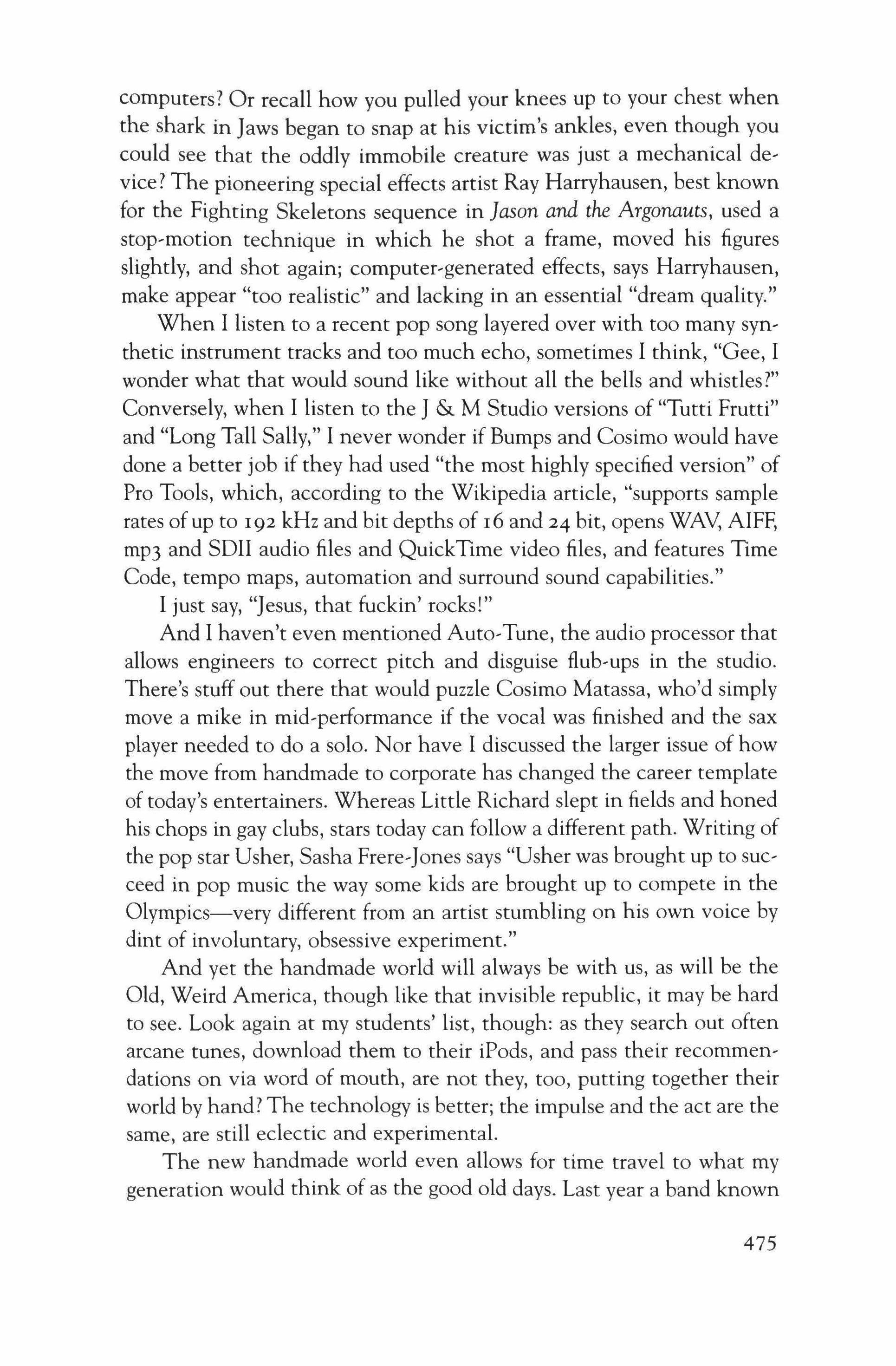
computers? Or recall how you pulled your knees up to your chest when the shark in Jaws began to snap at his victim's ankles, even though you could see that the oddly immobile creature was just a mechanical de, vice? The pioneering special effects artist Ray Harryhausen, best known for the Fighting Skeletons sequence in Jason and the Argonauts, used a stop-motion technique in which he shot a frame, moved his figures slightly, and shot again; computer,generated effects, says Harryhausen, make appear "too realistic" and lacking in an essential "dream quality."
When I listen to a recent pop song layered over with too many synthetic instrument tracks and too much echo, sometimes I think, "Gee, I wonder what that would sound like without all the bells and whistles?" Conversely, when I listen to the J & M Studio versions of "Tutti Frutti" and "Long Tall Sally," I never wonder if Bumps and Cosimo would have done a better job if they had used "the most highly specified version" of Pro Tools, which, according to the Wikipedia article, "supports sample rates of up to I 92 kHz and bit depths of I 6 and 24 bit, opens WAV, AIFF, mpj and SDn audio files and QuickTime video files, and features Time Code, tempo maps, automation and surround sound capabilities."
I just say, "Jesus, that fuckin' rocks!"
And I haven't even mentioned Auto-Tune, the audio processor that allows engineers to correct pitch and disguise flub,ups in the studio. There's stuff out there that would puzzle Cosimo Matassa, who'd simply move a mike in mid-performance if the vocal was finished and the sax player needed to do a solo. Nor have I discussed the larger issue of how the move from handmade to corporate has changed the career template of today's entertainers. Whereas Little Richard slept in fields and honed his chops in gay clubs, stars today can follow a different path. Writing of the pop star Usher, Sasha Frere-jones says "Usher was brought up to sueceed in pop music the way some kids are brought up to compete in the Olympics-very different from an artist stumbling on his own voice by dint of involuntary, obsessive experiment."
And yet the handmade world will always be with us, as will be the Old, Weird America, though like that invisible republic, it may be hard to see. Look again at my students' list, though: as they search out often arcane tunes, download them to their iPods, and pass their recommendations on via word of mouth, are not they, too, putting together their world by hand? The technology is better; the impulse and the act are the same, are still eclectic and experimental.
The new handmade world even allows for time travel to what my generation would think of as the good old days. Last year a band known
475
as lucifer released a concept album called r;autrichienne, which is about Marie Antoinette, known dismissively as "The Austrian" to her rivals in the French court. In vinyl yet, and double vinyl at that. Now does a double-LP album with a name in French sound like big box office to you? Me, neither. But if you want to put your music together the handmade way, this is how you roll.
And as I gave this essay its final haircut, I heard a live performance by a duo called the Two Man Gentleman Band, a couple of traveling dweebs who play the bass and the banjo and whose biggest hit is a tribute to our fattest president called "William Howard Taft." They sang and sounded as though they had stepped right out of one of those circuses the young Little Richard performed in, and when they finished, they stepped over to the merch table to hawk, not patent medicine, but cheap-looking T-shirts and CDs in cardboard covers.
And they gave everyone in the audience a free kazoo.
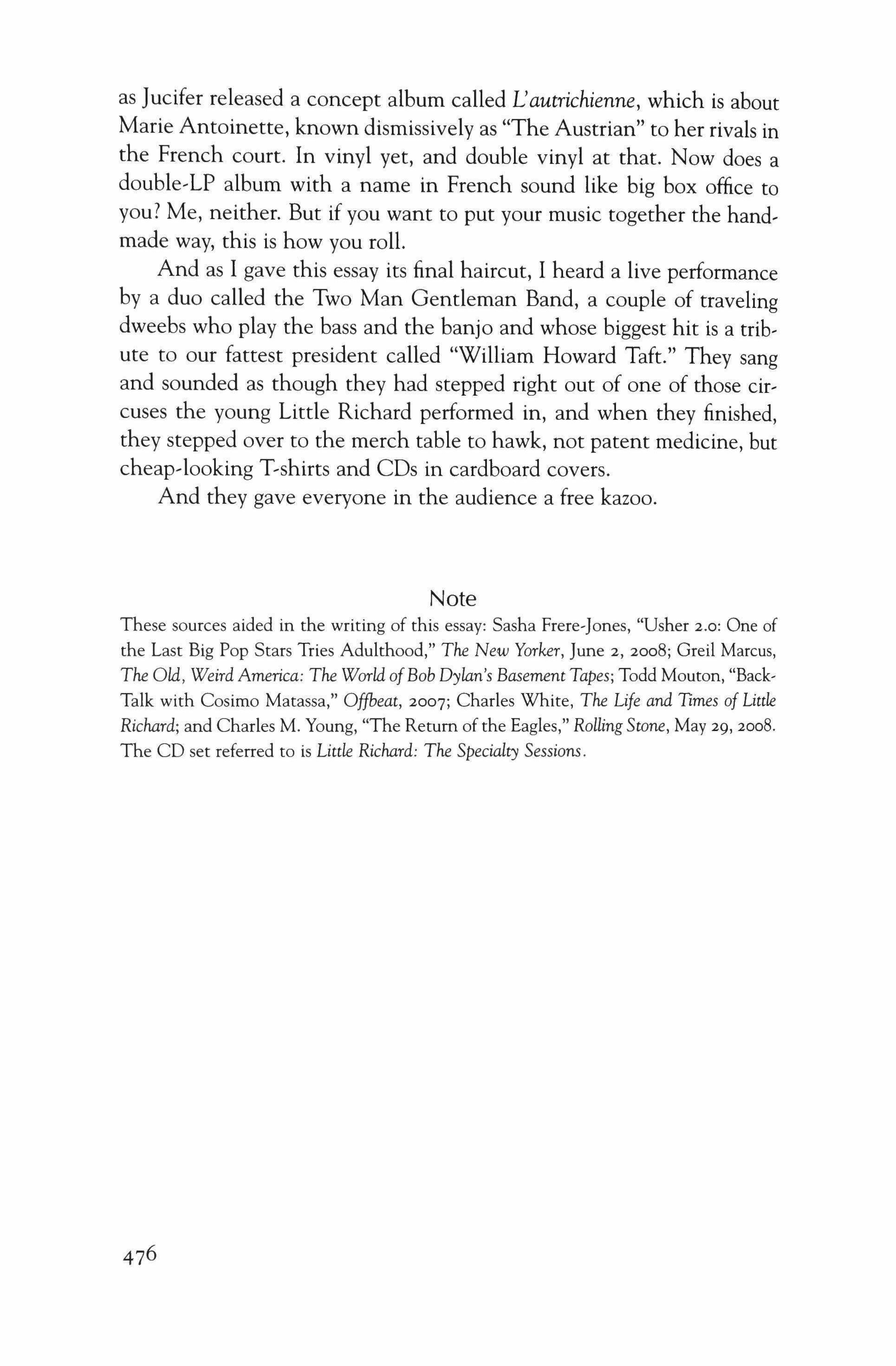
Note
These sources aided in the writing of this essay: Sasha Frere-jones, "Usher 2.0: One of the Last Big Pop Stars Tries Adulthood," The New Yorker, June 2, 2008; Greil Marcus, The Old, Weird America: The World ofBob Dylan's Basement Tapes; Todd Mouton, "BackTalk with Cosima Matassa," Offbeat, 2007; Charles White, The Life and Times of Little Richard; and Charles M. Young, "The Return ofthe Eagles," Rolling Swne, May 29, 2008. The CD set referred to is Little Richard: The Specialty Sessions.
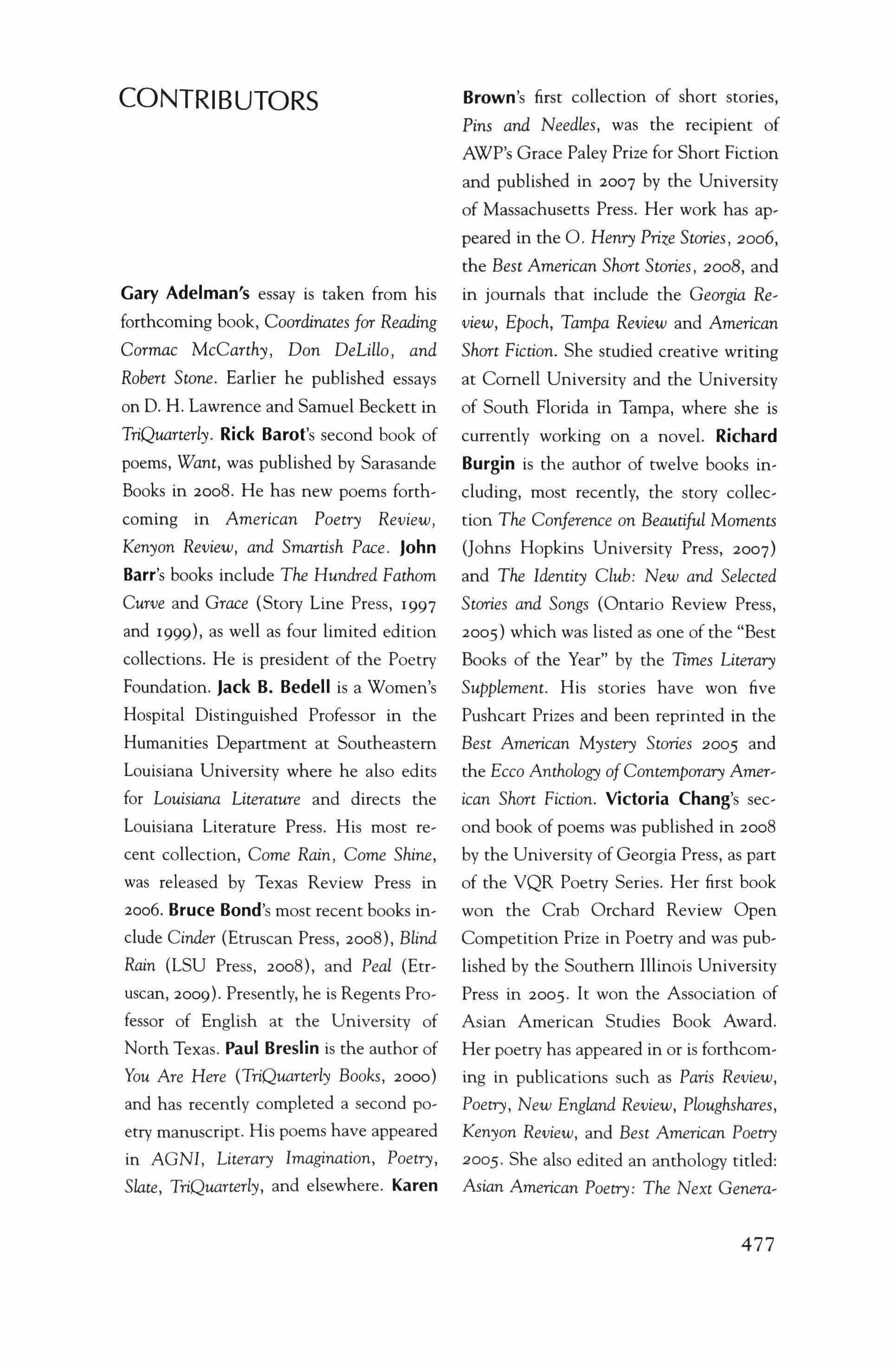
Gary Adelman's essay is taken from his forthcoming book, Coordinates for Reading Cormac McCarthy, Don DeLillo, and Robert Stone. Earlier he published essays on D. H. Lawrence and Samuel Beckett in TriQuarterly. Rick Barot's second book of poems, Want, was published by Sarasande Books in 2008. He has new poems forthcoming in American Poetry Review, Kenyon Review, and Smartish Pace. John Barr's books include The Hundred Fathom Curve and Grace (Story Line Press, 1997 and 1999), as well as four limited edition collections. He is president of the Poetry Foundation. Jack B. Bedell is a Women's Hospital Distinguished Professor in the Humanities Department at Southeastern Louisiana University where he also edits for Louisiana Literature and directs the Louisiana Literature Press. His most recent collection, Come Rain, Come Shine, was released by Texas Review Press in 2006. Bruce Bond's most recent books include Cinder (Etruscan Press, 2008), Blind Rain (LSU Press, 2008), and Peal (Etruscan, 2009). Presently, he is Regents Professor of English at the University of North Texas. Paul Breslin is the author of You Are Here (TriQuarterly Books, 2000) and has recently completed a second poetry manuscript. His poems have appeared in AGNI, Literary Imagination, Poetry, Slate, TriQuarterly, and elsewhere. Karen
Brown's first collection of short stories, Pins and Needles, was the recipient of AWP's Grace Paley Prize for Short Fiction and published in 2007 by the University of Massachusetts Press. Her work has appeared in the O. Henry Prize Stories, 2006, the Best American Short Stories, 2008, and in journals that include the Georgia Review, Epoch, Tampa Review and American Short Fiction. She studied creative writing at Cornell University and the University of South Florida in Tampa, where she is currently working on a novel. Richard Burgin is the author of twelve books including, most recently, the story collection The Conference on Beautiful Moments (Johns Hopkins University Press, 2007) and The Identity Club: New and Selected Stories and Songs (Ontario Review Press, 2005) which was listed as one of the "Best Books of the Year" by the Times Literary Supplement. His stories have won five Pushcart Prizes and been reprinted in the Best American Mystery Stories 2005 and the Ecco Anthology ofContemporary American Short Fiction. Victoria Chang's second book of poems was published in 2008 by the University of Georgia Press, as part of the VQR Poetry Series. Her first book won the Crab Orchard Review Open Competition Prize in Poetry and was published by the Southern Illinois University Press in 2005. It won the Association of Asian American Studies Book Award. Her poetry has appeared in or is forthcoming in publications such as Paris Review, Poetry, New England Review, Ploughshares, Kenyon Review, and Best American Poetry 2005. She also edited an anthology titled: Asian American Poetry: The Next Genera-
CONTRIBUTORS
477
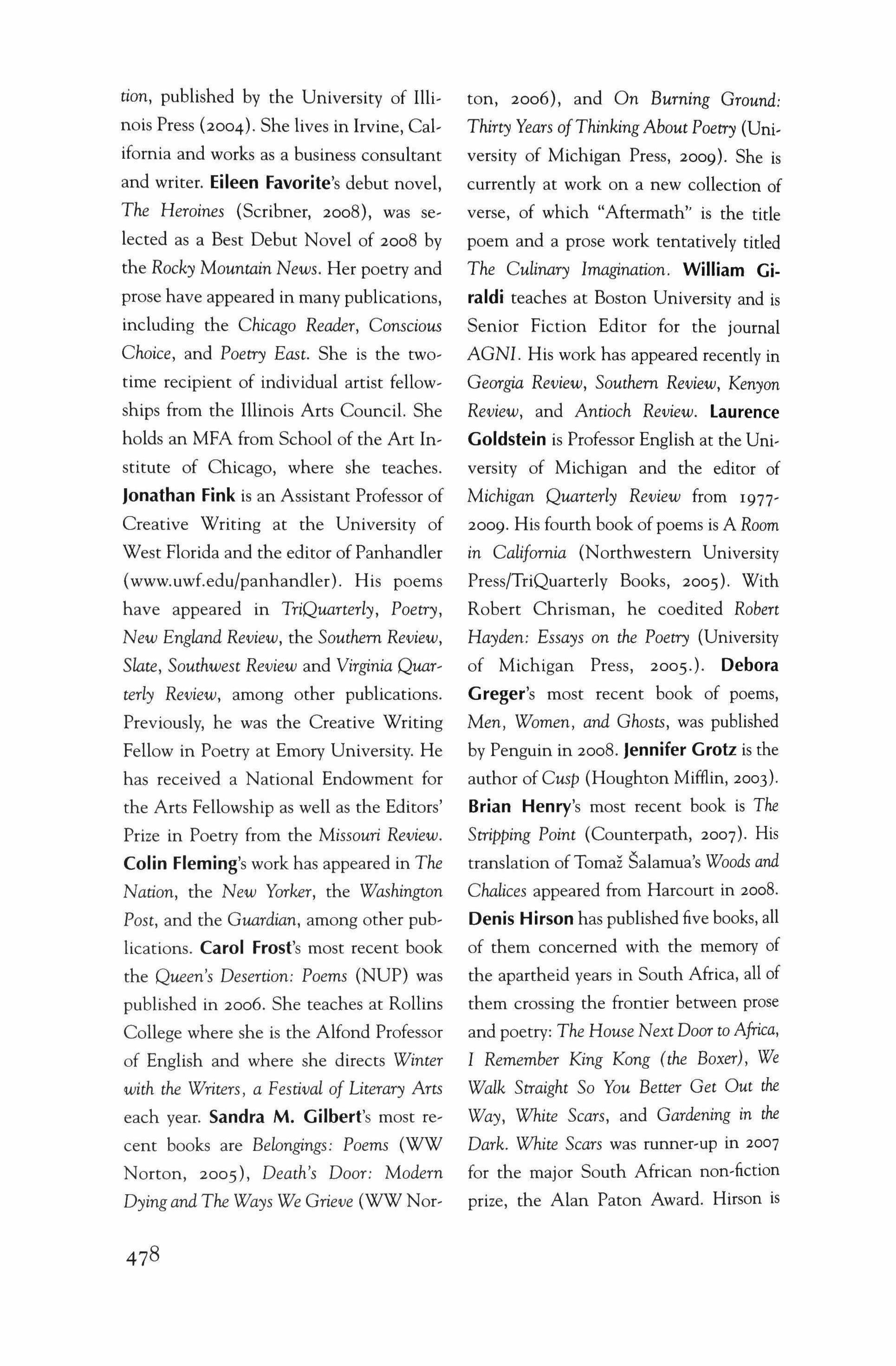
tion, published by the University of Illinois Press (2004). She lives in Irvine, California and works as a business consultant and writer. Eileen Favorite's debut novel, The Heroines (Scribner, 2008), was selected as a Best Debut Novel of 2008 by the Rocky Mountain News. Her poetry and prose have appeared in many publications, including the Chicago Reader, Conscious Choice, and Poetry East. She is the twotime recipient of individual artist fellowships from the Illinois Arts Council. She holds an MFA from School of the Art Institute of Chicago, where she teaches.
Jonathan Fink is an Assistant Professor of Creative Writing at the University of West Florida and the editor of Panhandler (www.uwf.edu/panhandler). His poems have appeared in TriQuarterly, Poetry, New England Review, the Southern Review, Slate, Southwest Review and Virginia Quarterly Review, among other publications. Previously, he was the Creative Writing Fellow in Poetry at Emory University. He has received a National Endowment for the Arts Fellowship as well as the Editors' Prize in Poetry from the Missouri Review. Colin Fleming's work has appeared in The Nation, the New Yorker, the Washington Post, and the Guardian, among other publications. Carol Frost's most recent book the Queen's Desertion: Poems (NUP) was published in 2006. She teaches at Rollins College where she is the Alfond Professor of English and where she directs Winter with the Writers, a Festival of Literary Arts each year. Sandra M. Gilbert's most recent books are Belongings: Poems (WW Norton, 2005), Death's Door: Modern Dying and The Ways We Grieve (WW Nor-
ton, 2006), and On Burning Ground: Thirty Years ofThinking About Poetry (University of Michigan Press, 2009). She is currently at work on a new collection of verse, of which "Aftermath" is the title poem and a prose work tentatively titled The Culinary Imagination. William Giraldi teaches at Boston University and is Senior Fiction Editor for the journal AGNI. His work has appeared recently in Georgia Review, Southern Review, Kenyon Review, and Antioch Review. laurence Goldstein is Professor English at the University of Michigan and the editor of Michigan Quarterly Review from 19772009. His fourth book of poems is A Room in California (Northwestern University Press/TriQuarterly Books, 2005). With Robert Chrisman, he coedited Robert Hayden: Essays on the Poetry (University of Michigan Press, 2005.). Debora Greger's most recent book of poems, Men, Women, and Ghosts, was published by Penguin in 2008. Jennifer Grotz is the author of Cusp (Houghton Mifflin, 2003). Brian Henry's most recent book is The Stripping Point (Counterpath, 2007). His translation of Tomas Salamua's Woods and Chalices appeared from Harcourt in 2008. Denis Hirson has published five books, all of them concerned with the memory of the apartheid years in South Africa, all of them crossing the frontier between prose and poetry: The House Next Door to Africa, I Remember King Kong (the Boxer), We Walk Straight So You Better Get Out the Way, White Scars, and Gardening in the Dark. White Scars was runner-up in 2007 for the major South African non-fiction prize, the Alan Paton Award. Hirson is
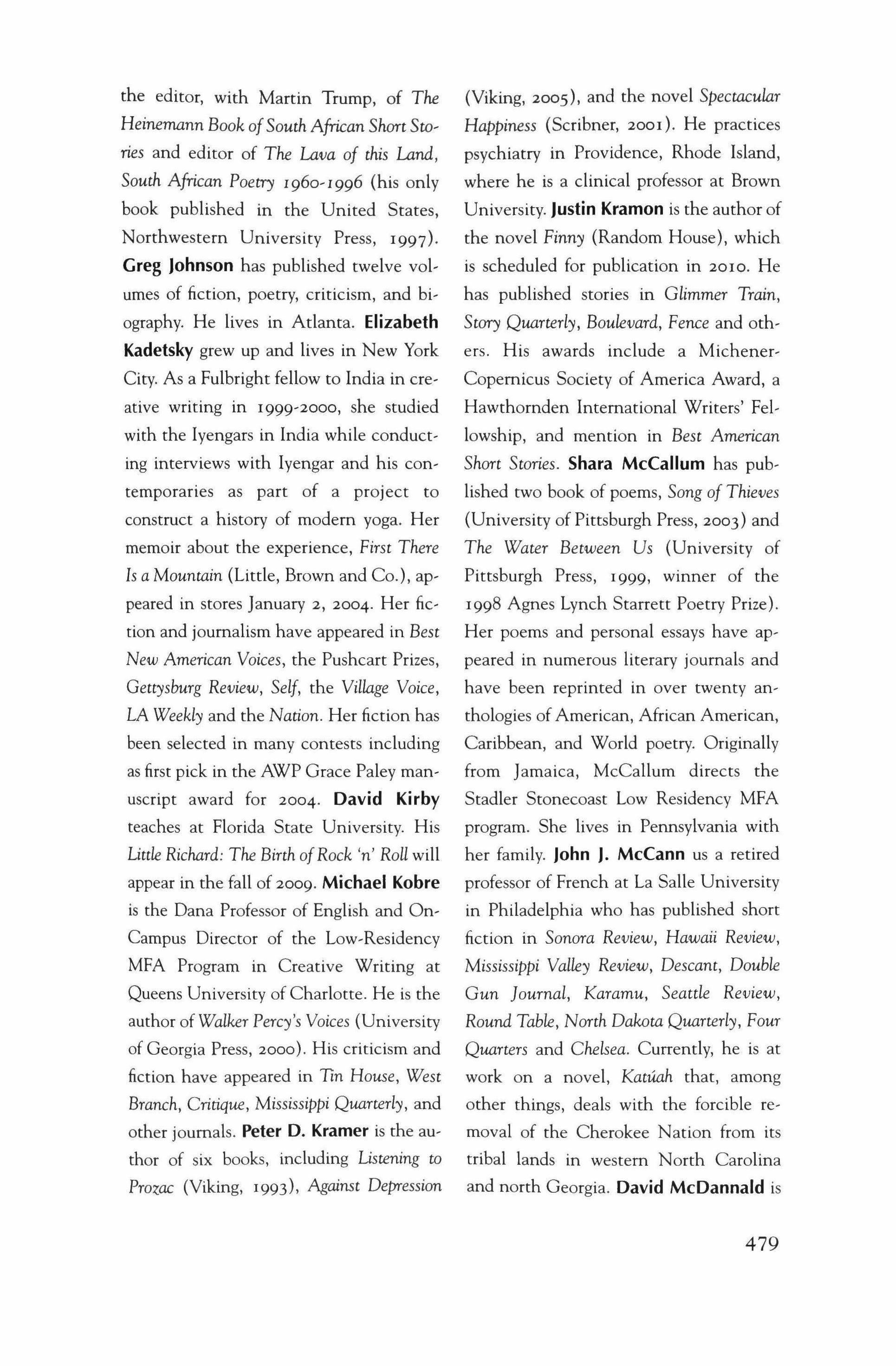
the editor, with Martin Trump, of The Heinemann Book ofSouth African Short Stories and editor of The Lava of this Land, South African Poetry 1960-1996 (his only book published in the United States, Northwestern University Press, 1997).
Greg Johnson has published twelve volumes of fiction, poetry, criticism, and biography. He lives in Atlanta. Elizabeth Kadetsky grew up and lives in New York City. As a Fulbright fellow to India in creative writing in 1999-2000, she studied with the Iyengars in India while conducting interviews with Iyengar and his contemporaries as part of a project to construct a history of modern yoga. Her memoir about the experience, First There Is a Mountain (Little, Brown and Co.), appeared in stores January 2, 2004. Her fiction and journalism have appeared in Best New American Voices, the Pushcart Prizes, Gettysburg Review, Self, the Village Voice, LA Weekly and the Nation. Her fiction has been selected in many contests including as first pick in the AWP Grace Paley manuscript award for 2004. David Kirby teaches at Florida State University. His Uttle Richard: The Birth ofRock 'n' RoU will appear in the fall of 2009. Michael Kobre is the Dana Professor of English and OnCampus Director of the Low-Residency MFA Program in Creative Writing at Queens University of Charlotte. He is the author of Walker Percy's Voices (University of Georgia Press, 2000). His criticism and fiction have appeared in Tin House, West Branch, Critique, MississiPPi Quarterly, and other journals. Peter D. Kramer is the author of six books, including Listening to Prozac (Viking, 1993), Against Depression
(Viking, 2005), and the novel Spectacular Happiness (Scribner, 2001). He practices psychiatry in Providence, Rhode Island, where he is a clinical professor at Brown University. Justin Kramon is the author of the novel Finny (Random House), which is scheduled for publication in 2010. He has published stories in Glimmer Train, Story Quarterly, Boulevard, Fence and others. His awards include a MichenerCopernicus Society of America Award, a Hawthomden International Writers' Fellowship, and mention in Best American Short Stories. Shara McCallum has published two book of poems, Song of Thieves (University of Pittsburgh Press, 2003) and The Water Between Us (University of Pittsburgh Press, 1999, winner of the 1998 Agnes Lynch Starrett Poetry Prize). Her poems and personal essays have appeared in numerous literary journals and have been reprinted in over twenty anthologies of American, African American, Caribbean, and World poetry. Originally from Jamaica, McCallum directs the Stadler Stonecoast Low Residency MFA program. She lives in Pennsylvania with her family. John J. McCann us a retired professor of French at La Salle University in Philadelphia who has published short fiction in Sonora Review, Hawaii Review, Mississippi Valley Review, Descant, Double Gun Journal, Karamu, Seattle Review, Round Table, North Dakota Quarterly, Four Quarters and Chelsea. Currently, he is at work on a novel, Katu.a.h that, among other things, deals with the forcible removal of the Cherokee Nation from its tribal lands in western North Carolina and north Georgia. David McDannald is
479
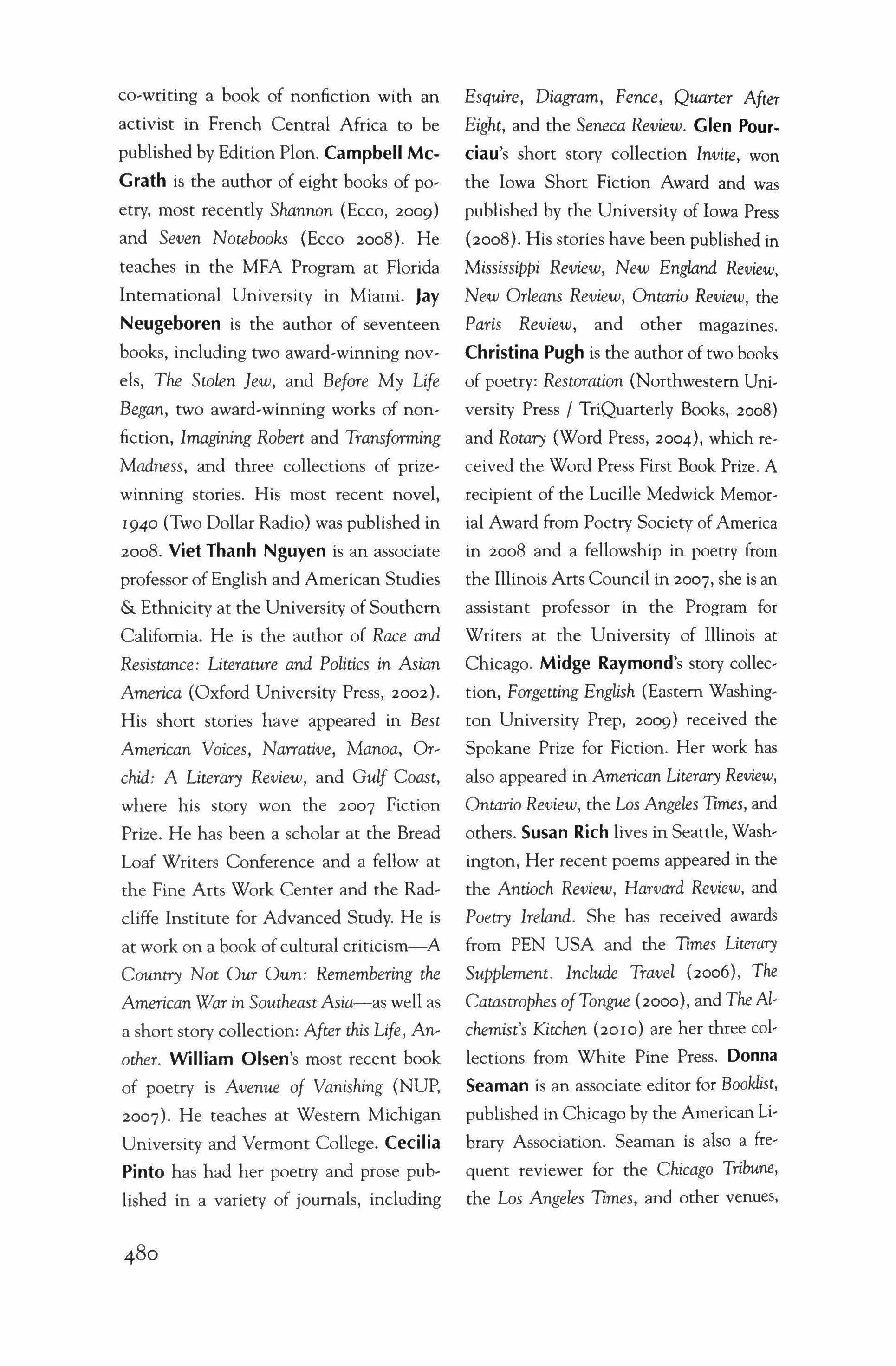
co-writing a book of nonfiction with an activist in French Central Africa to be published by Edition Pion. Campbell McGrath is the author of eight books of poetry, most recently Shannon (Ecco, 2009) and Seven Notebooks (Ecco 2008). He teaches in the MFA Program at Florida International University in Miami. Jay Neugeboren is the author of seventeen books, including two award-winning novels, The Stolen Jew, and Before My Life Began, two award-winning works of nonfiction, Imagining Robert and Transforming Madness, and three collections of prizewinning stories. His most recent novel, I 940 (Two Dollar Radio) was published in 2008. Viet Thanh Nguyen is an associate professor of English and American Studies & Ethnicity at the University of Southern California. He is the author of Race and Resistance: Literature and Politics in Asian America (Oxford University Press, 2002). His short stories have appeared in Best American Voices, Narrative, Manoa, Orchid: A Literary Review, and Gulf Coast, where his story won the 2007 Fiction Prize. He has been a scholar at the Bread Loaf Writers Conference and a fellow at the Fine Arts Work Center and the Radcliffe Institute for Advanced Study. He is at work on a book ofcultural criticism-A Country Not Our Own: Remembering the American War in Southeast Asia-as well as a short story collection: After this Life, Another. William Olsen's most recent book of poetry is Avenue of Vanishing (NUP, 2007). He teaches at Western Michigan University and Vermont College. Cecilia Pinto has had her poetry and prose published in a variety of journals, including
Esquire, Diagram, Fence, Quarter After Eight, and the Seneca Review. Glen Pourciau's short story collection Invite, won the Iowa Short Fiction Award and was published by the University of Iowa Press (2008). His stories have been published in MississiPPi Review, New England Review, New Orleans Review, Ontario Review, the Paris Review, and other magazines. Christina Pugh is the author of two books of poetry: Restoration (Northwestern University Press / TriQuarterly Books, 2008) and Rotary (Word Press, 2004), which received the Word Press First Book Prize. A recipient of the Lucille Medwick Memorial Award from Poetry Society ofAmerica in 2008 and a fellowship in poetry from the Illinois Arts Council in 2007, she is an assistant professor in the Program for Writers at the University of Illinois at Chicago. Midge Raymond's story collection, Forgetting English (Eastern Washington University Prep, 2009) received the Spokane Prize for Fiction. Her work has also appeared in American Literary Review, Ontario Review, the Los Angeles Times, and others. Susan Rich lives in Seattle, Washington, Her recent poems appeared in the the Antioch Review, Harvard Review, and Poetry Ireland. She has received awards from PEN USA and the Times Literary Supplement. Include Travel (2006), The Catastrophes ofTongue (2000), and The Alchemist's Kitchen (2010) are her three collections from White Pine Press. Donna Seaman is an associate editor for Booklist, published in Chicago by the American library Association. Seaman is also a frequent reviewer for the Chicago Tribune, the Los Angeles Times, and other venues,
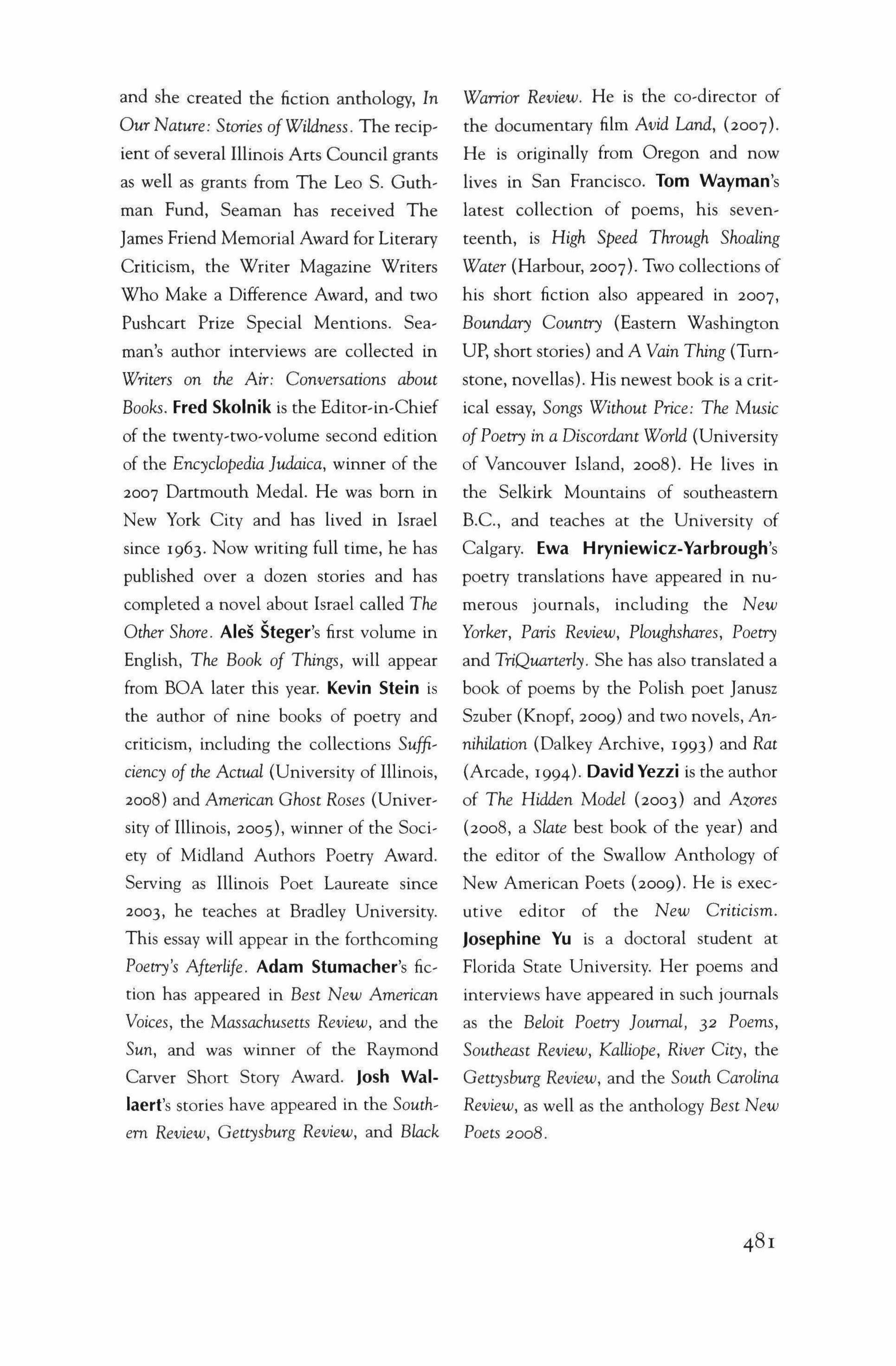
and she created the fiction anthology, In Our Nature: Stories of Wildness. The recipient of several Illinois Arts Council grants as well as grants from The Leo S. Guthman Fund, Seaman has received The James Friend Memorial Award for Literary Criticism, the Writer Magazine Writers Who Make a Difference Award, and two Pushcart Prize Special Mentions. Seaman's author interviews are collected in Writers on the Air: Conversations about Books. Fred Skolnik is the Editor-in-Chief of the twenty-two-volume second edition of the Encyclopedia Judaica, winner of the 2007 Dartmouth Medal. He was born in New York City and has lived in Israel since 1963. Now writing full time, he has published over a dozen stories and has completed a novel about Israel called The Other Shore. Ales Steger's first volume in English, The Book of Things, will appear from BOA later this year. Kevin Stein is the author of nine books of poetry and criticism, including the collections Sufficiency of the Actual (University of Illinois, 2008) and American Ghost Roses (University of Illinois, 2005), winner of the Society of Midland Authors Poetry Award. Serving as Illinois Poet Laureate since 2003, he teaches at Bradley University. This essay will appear in the forthcoming Poetry's Afterlife. Adam Stumacher's fiction has appeared in Best New American Voices, the Massachusetts Review, and the Sun, and was winner of the Raymond Carver Short Story Award. Josh Wallaert's stories have appeared in the Southern Review, Gettysburg Review, and Black
Warrior Review. He is the co-director of the documentary film Avid Land, (2007). He is originally from Oregon and now lives in San Francisco. Tom Wayman's latest collection of poems, his seventeenth, is High Speed Through Shoaling Water (Harbour, 2007). Two collections of his short fiction also appeared in 2007, Boundary Country (Eastern Washington UP, short stories) and A Vain Thing (Turnstone, novellas). His newest book is a critical essay, Songs Without Price: The Music ofPoetry in a Discordant World (University of Vancouver Island, 2008). He lives in the Selkirk Mountains of southeastern B.C., and teaches at the University of Calgary. Ewa Hryniewicz-Yarbrough's poetry translations have appeared in numerous journals, including the New Yorker, Paris Review, Ploughshares, Poetry and TriQuarterly. She has also translated a book of poems by the Polish poet Janusz Szuber (Knopf, 2009) and two novels, Annihilation (Dalkey Archive, 1993) and Rat (Arcade, 1994). David Yezzi is the author of The Hidden Model (2003) and Azores (2008, a Slate best book of the year) and the editor of the Swallow Anthology of New American Poets (2009). He is executive editor of the New Criticism.
Josephine Yu is a doctoral student at Florida State University. Her poems and interviews have appeared in such journals as the Beloit Poetry Journal, 32 Poems, Southeast Review, Kalliope, River City, the Gettysburg Review, and the South Carolina Review, as well as the anthology Best New Poets 2008.
Reprints
Reprints of issues I - 17 of TriQuarterly are available in full format from Kraus Reprint Company, Route 100, Millwood, NY 10546, and all issues in microfilm from University Microfilms International, 300 North Zeeb Road, Ann Arbor, MI 48106.
Indexing
TriQuarterly is indexed in the Humanities Index (H. W. Wilson Co.), Humanities International Complete (Whitson Publishing Co.), Historical Abstracts, MLA, EBSCO Publishing (Peabody, MA) and Informa-tion Access Co. (Foster City, CAl.
Distributors
Our national distributors to retail trade are Ingram Periodicals (La Vergne, TN); B. DeBoer (Nutley, NJ); Ubiquity (Brooklyn, NY); Armadillo (Los Angeles, CAl.
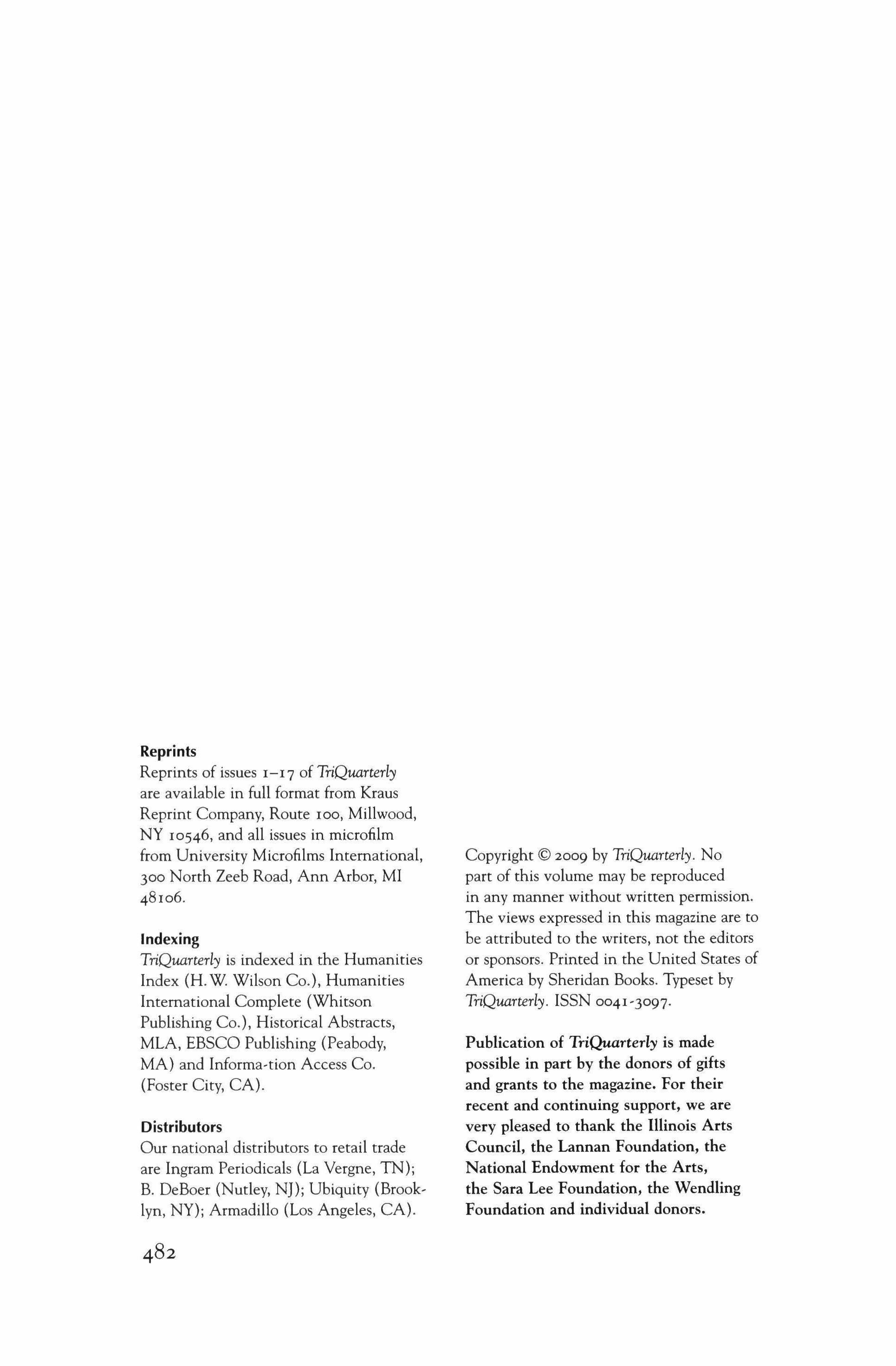
Copyright © 2009 by TriQuarterly. No part of this volume may be reproduced in any manner without written permission. The views expressed in this magazine are to be attributed to the writers, not the editors or sponsors. Printed in the United States of America by Sheridan Books. Typeset by TriQuarterly. ISSN 0041-3097.
Publication of TriQuarterly is made possible in part by the donors of gifts and grants to the magazine. For their recent and continuing support, we are very pleased to thank the Illinois Arts Council, the Lannan Foundation, the National Endowment for the Arts, the Sara Lee Foundation, the Wendling Foundation and individual donors.
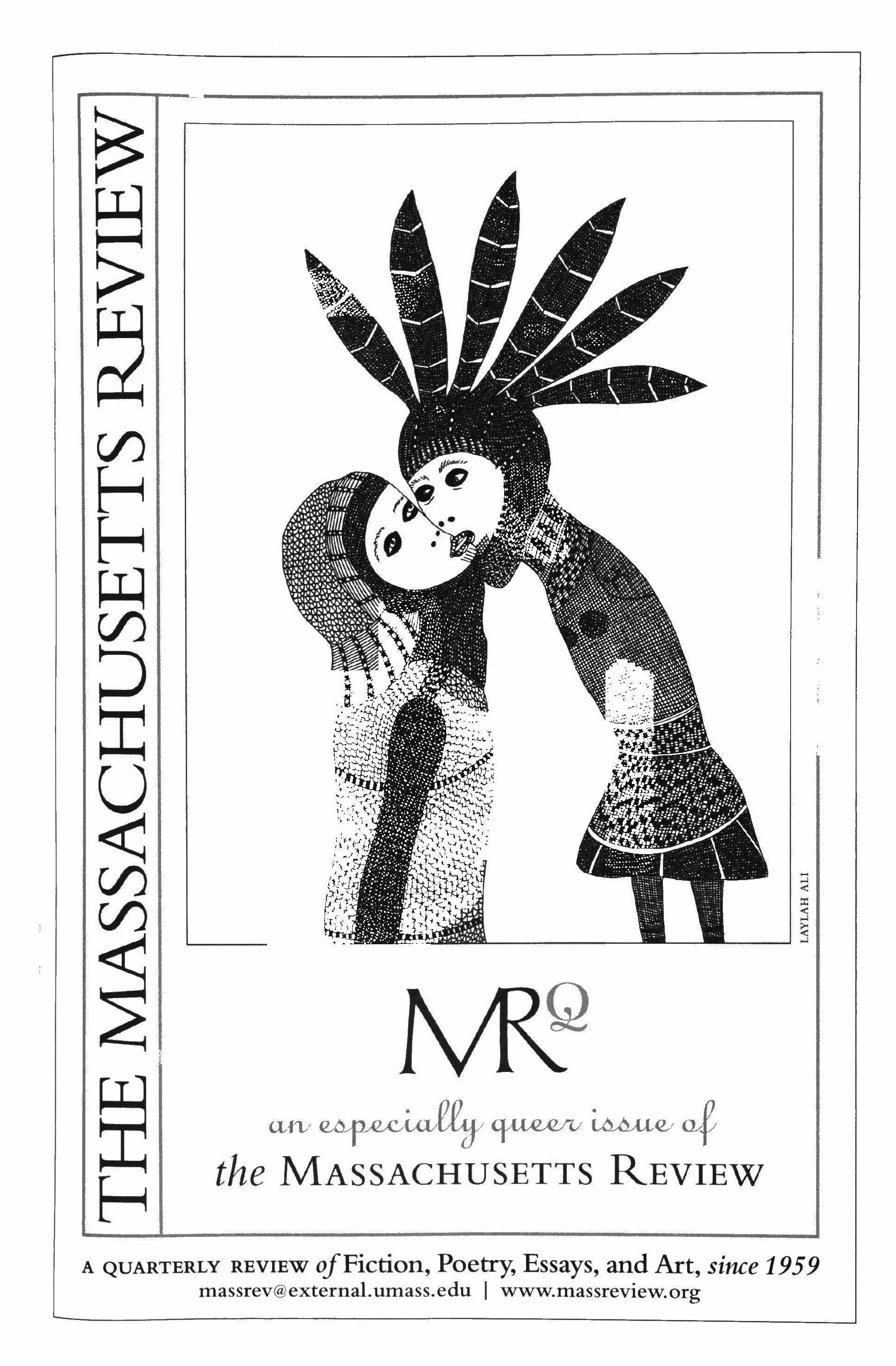
massrev@external.umass.edu I www.massreview.org
A QUARTERLY
ofFiction, Poetry, Essays, and Art, since 1959
<.LfV M/p�� � �Q/ Q_,,� the MASSACHUSETTS REVIEW
REVIEW

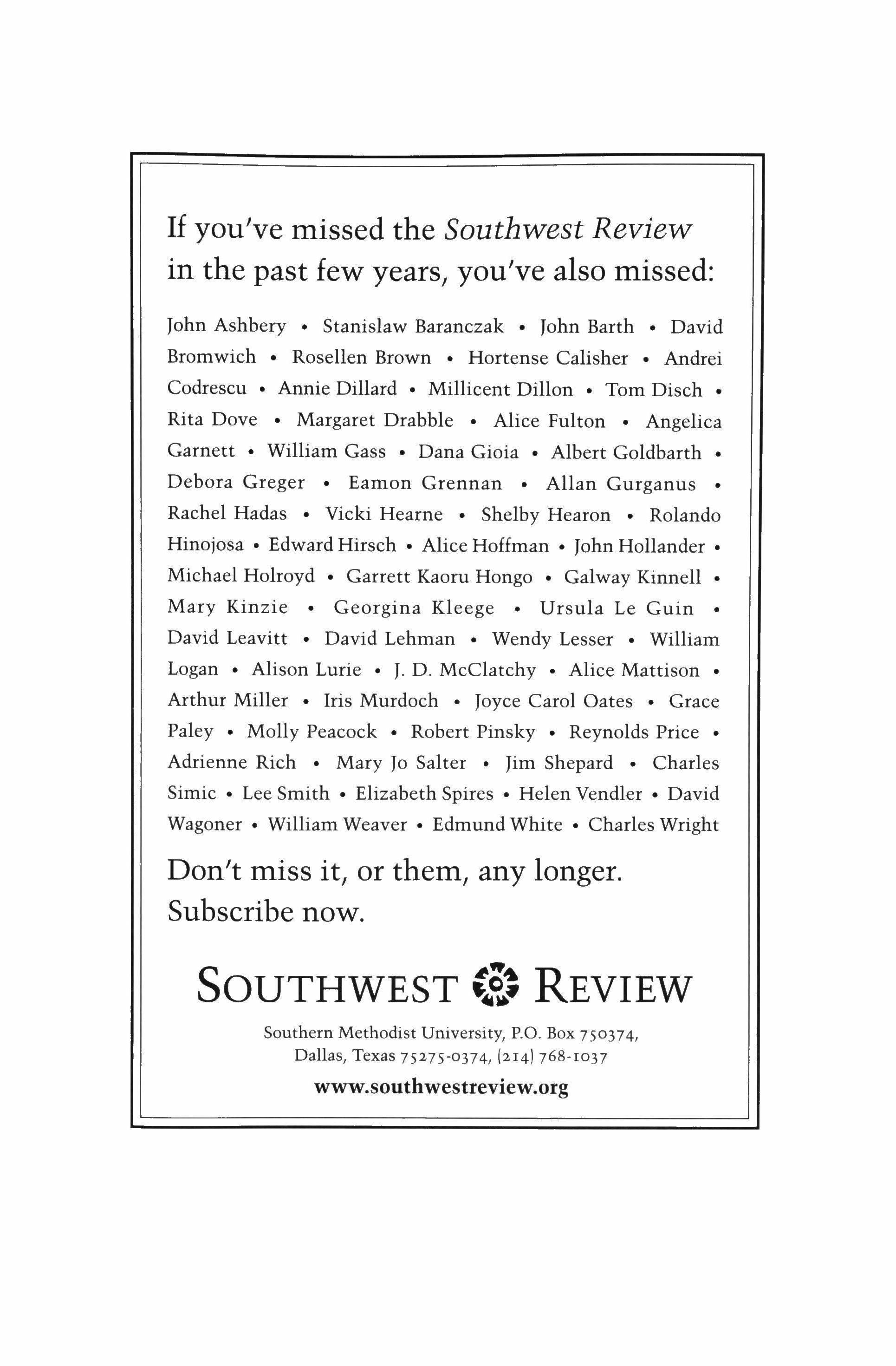
If you've missed the Southwest Review in the past few years, you've also missed:
John Ashbery Stanislaw Baranczak John Barth David
Bromwich Rosellen Brown Hortense Calisher Andrei
Codrescu Annie Dillard Millicent Dillon Tom Disch
Rita Dove Margaret Drabble Alice Fulton Angelica Garnett William Gass Dana Gioia Albert Goldbarth
Debora Greger Eamon Grennan Allan Gurganus
Rachel Hadas Vicki Hearne Shelby Hearon Rolando Hinojosa. Edward Hirsch « Alice Hoffman. John Hollander. Michael Holroyd Garrett Kaoru Hongo Galway Kinnell
Mary Kinzie Georgina Kleege Ursula Le Guin
David Leavitt David Lehman Wendy Lesser William
Logan Alison Lurie J. D. McClatchy Alice Mattison
Arthur Miller Iris Murdoch Joyce Carol Oates Grace Paley Molly Peacock Robert Pinsky Reynolds Price
Adrienne Rich Mary [o Salter Jim Shepard Charles
Simic Lee Smith Elizabeth Spires Helen Vendler David Wagoner. William Weaver· Edmund White· Charles Wright
Don't miss it, or them, any longer. Subscribe now. SOUTHWEST ��� REVIEW Southern Methodist University, P.O. Box 750374, Dallas, Texas 75275-0374, (2141768-1037 www.southwestreview.org

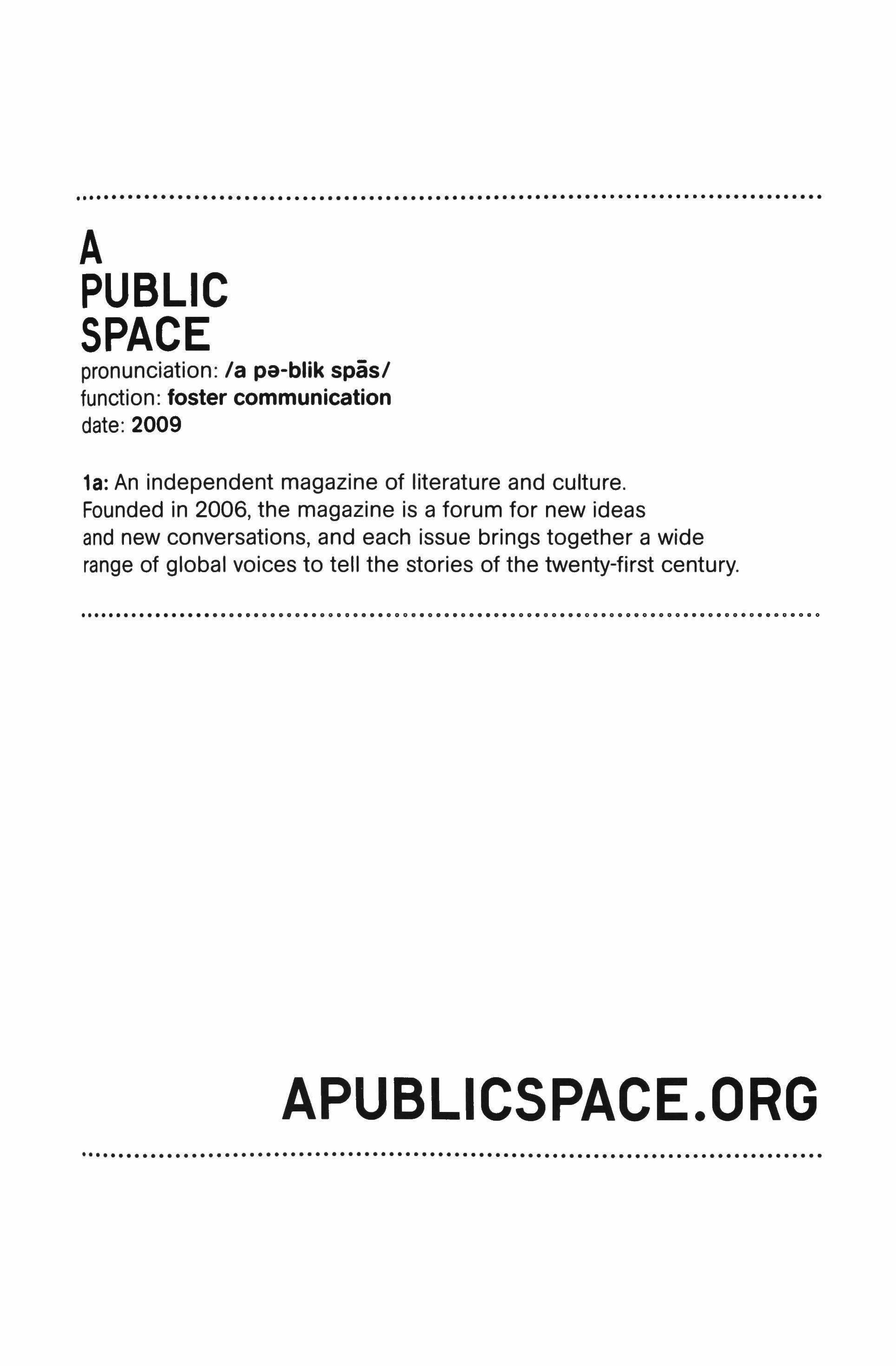
A PUBLIC SPACE
pronunciation: la pe-blik spas1 function: foster communication date: 2009
1a: An independent magazine of literature and culture. Founded in 2006, the magazine is a forum for new ideas and new conversations, and each issue brings together a wide range of global voices to tell the stories of the twenty-first century.
...•.••...•••...•...•........................•.....•....••....................•............
APUBLICSPACE.ORG ......................................................................•....................











































































































































































































































































































































































































































































































